Anierlcan Fictionm
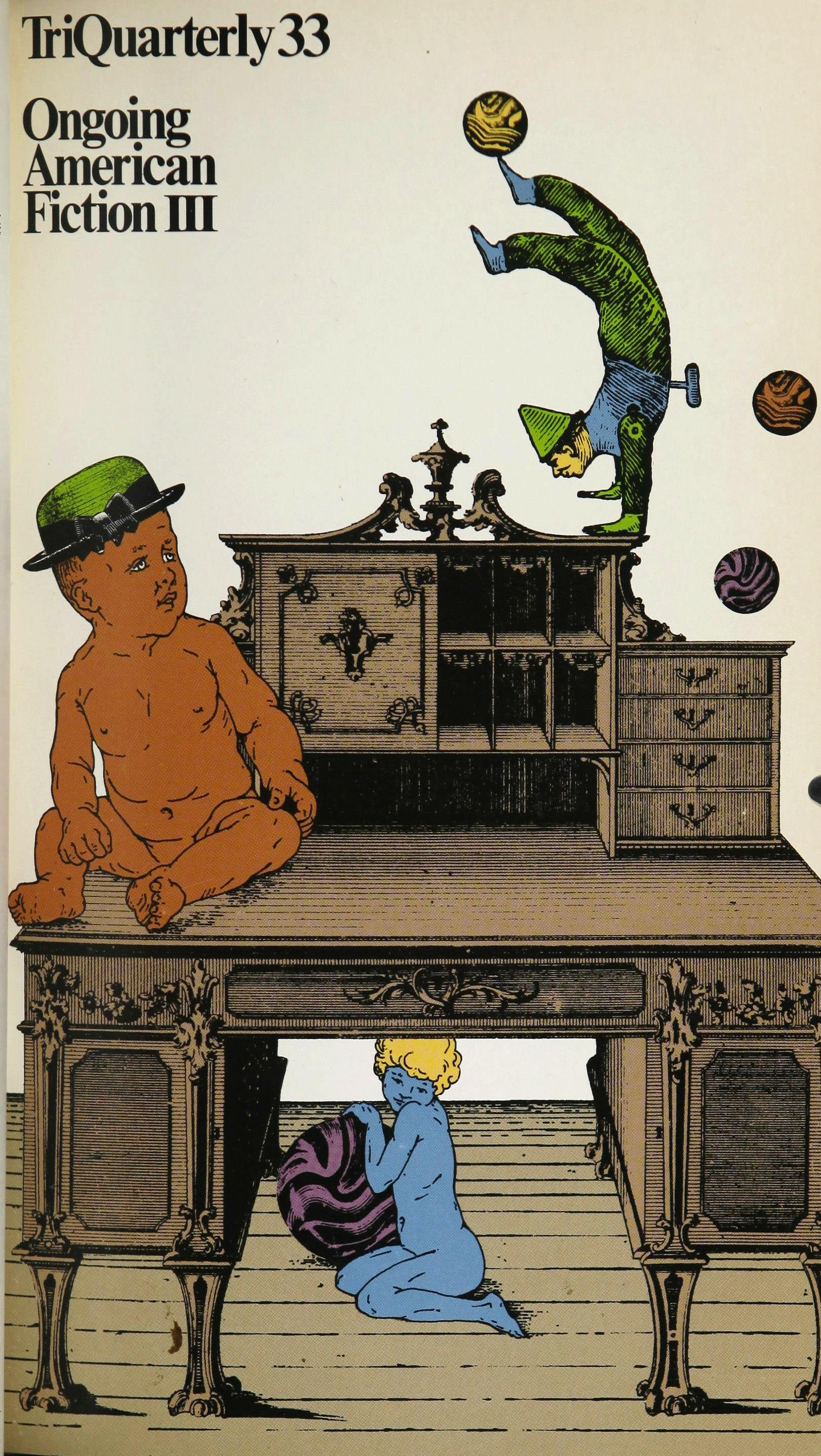
Ongo\ng
lfiQuarterly33
-��-

EDITOR
ART DIRECTOR
MANAGING EDITOR
ASSOCIATE EDITORS
ASSISTANT EDITORS
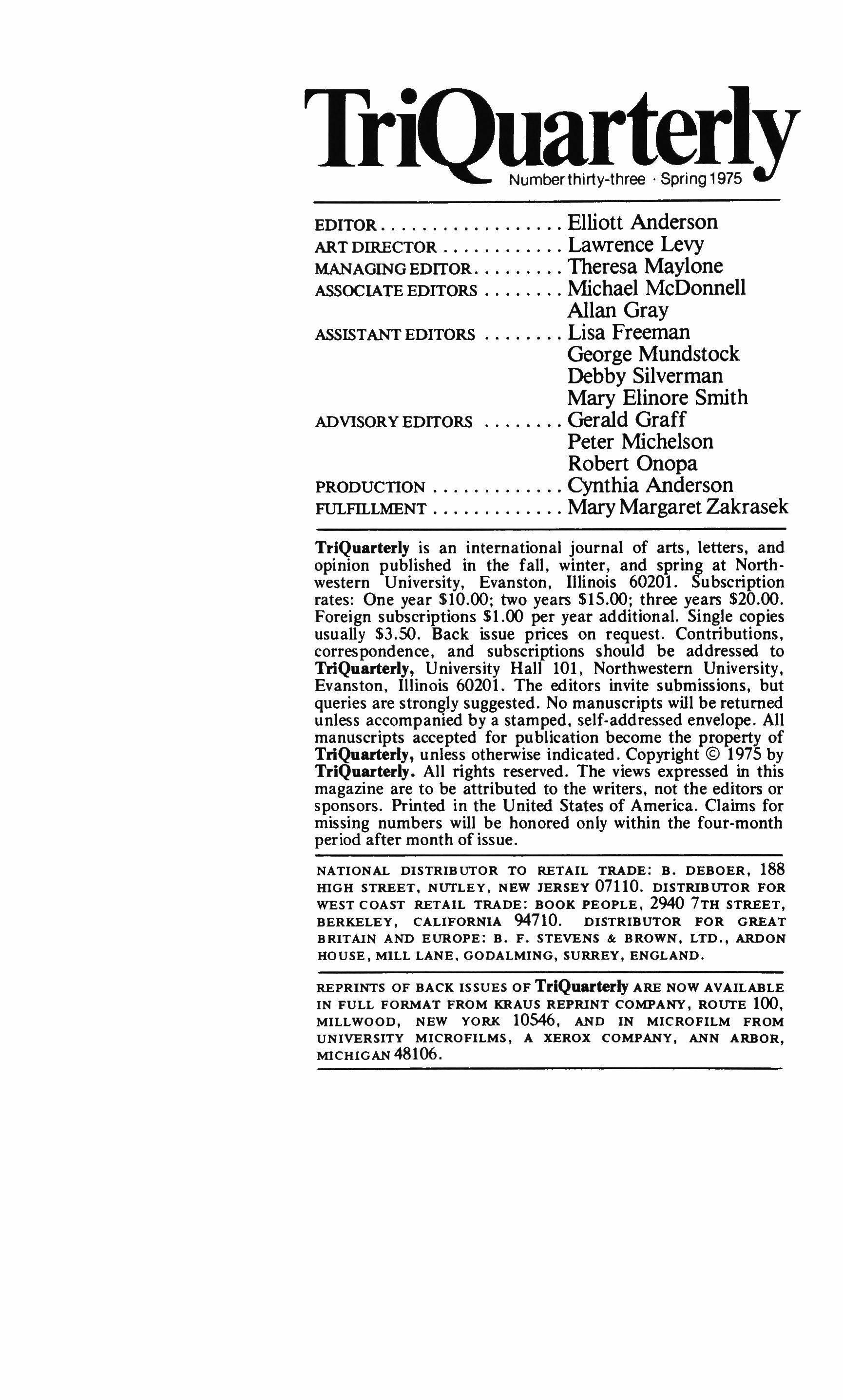
ADVISORY EDITORS
PRODUCTION
FULFll.LMENT
Elliott Anderson
Lawrence Levy
Theresa Maylone
Michael McDonnell
Allan Gray
Lisa Freeman
George Mundstock
Debby Silverman
Mary Elinore Smith
Gerald Graff
Peter Michelson
Robert Onopa
Cynthia Anderson
Mary Margaret Zakrasek
TriQuarterly is an international journal of arts, letters, and opinion published in the fall, winter, and spring at Northwestern University, Evanston, Illinois 60201. Subscription rates: One year $10.00; two years $15.00; three years $20.00. Foreign subscriptions $1.00 per year additional. Single copies usually $3.50. Back issue prices on request. Contributions, correspondence, and subscriptions should be addressed to TrlQuarterly, University Hall 101, Northwestern University, Evanston, Illinois 60201. The editors invite submissions, but queries are strongly suggested. No manuscripts will be returned unless accompanied by a stamped, self-addressed envelope. All manuscripts accepted for publication become the property of TriQuarterly, unless otherwise indicated. Copyright © 1975 by TriQuarterly. All rights reserved. The views expressed in this magazine are to be attributed to the writers, not the editors or sponsors. Printed in the United States of America. Claims for missing numbers will be honored only within the four-month period after month of issue.
NATIONAL DISTRIBUTOR TO RETAIL TRADE: B. DEBOER, 188 HIGH STREET, NUTLEY, NEW JERSEY 07110. DISTRIBUTOR FOR WEST COAST RETAIL TRADE: BOOK PEOPLE, 2940 7TH STREET, BERKELEY, CALIFORNIA 94710. DISTRIBUTOR FOR GREAT BRITAIN AND EUROPE: B. F. STEVENS'" BROWN, LTD., ARDON HOUSE, MILL LANE. GODALMING, SURREY, ENGLAND.
REPRINTS OF BACK ISSUES OF TriQuarterly ARE NOW AVAILABLE IN FULL FORMAT FROM KRAUS REPRINT COMPANY, ROUTE 100, MILLWOOD, NEW YORK 10546, AND IN MICROFILM FROM UNIVERSITY MICROFILMS, A XEROX COMPANY, ANN ARBOR, MICHIGAN 48106.
JAMES PURDY
M. D. ELEVITCH
ARTHUR A. COHEN
DAVID KRANES
ROBERT ONOPA
FREDERIC 1UfEN
MICHAEL ANANIA
DANIEL HALPERN
DANIEL HALPERN
ALAN Sll.LITOE
CESARE PAVESE

ROBERT ALTER
EDWARDW. SAID
MORRIS DICKSTEIN
FRANK MC CONNELL
GERALD GRAFF
Fiction from The house of the solitary maggot 5
Single for tonight 71 Hans Cassebeer and the Virgin's rose 79
Cordials 113
The man who swam throughjellyfish, through men-of-war 121 Letter from Mao to Malraux 131
The Red Menace 141 A balance of nature 153
Interview
An interview with Paul Bowles 159
Foreignperspectives Harrison's row 179 from The crystal world: notes on excerpts from Cesare Pavese's Thejobofliving translated by Richard Koffler 185
Criticism
The self-conscious moment: reflections on the aftermath of modernism ]ffi Contemporary fiction and criticism 231 Fiction hot and kool: dilenunas of the experimental writer 257 The corpse ofthe dragon: notes on postromantic fiction 273 Babbitt at the abyss: thesocial context of postrmdem American fiction sos
This issue of TriQuarterly was illustratedby WilliamE Biderbost

With issues33/34, CharlesNewman, Editorandfounderofthisjournal, resigned. He willcontinue toserve in an advisorycapacity.
ElliottAnderson, presentExecutive Editor, assumes editorship.
TheresaMaylone, ManagingEditor, andLawrenceLevy, ArtDirector, willcontinue to have thingspretty much their own way.

I
from The house ofthe solitary maggot
James Purdy
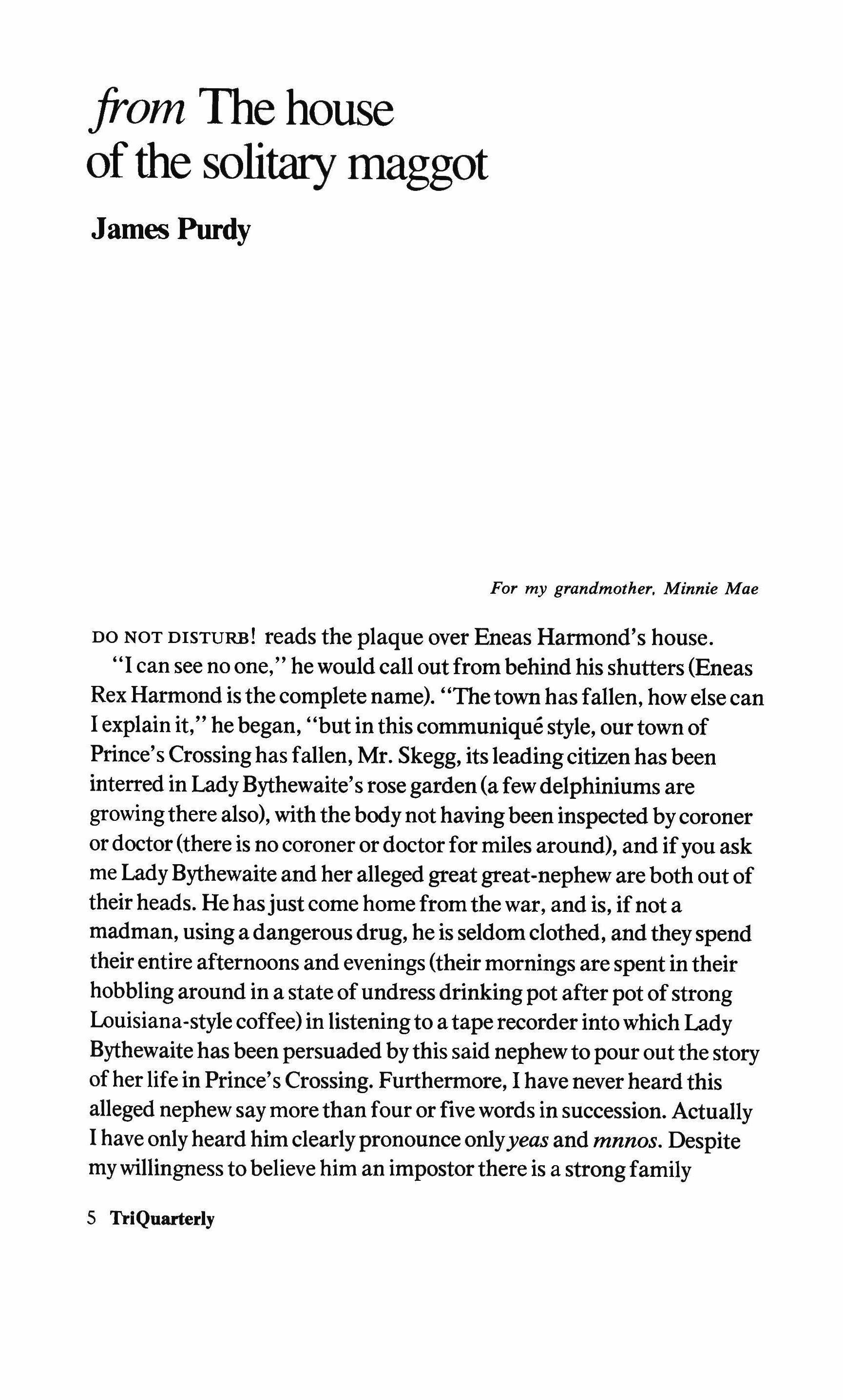
For my grandmother. Minnie Mae
DO NOT DISTURB! reads the plaque over Eneas Harmond's house.
"I can see no one," he would call out from behind his shutters (Eneas Rex Harmond is the complete name). "The town has fallen, how else can I explain it," he began, "but in this communiquestyle, our town of Prince's Crossing has fallen, Mr. Skegg, its leadingcitizen has been interred in LadyBythewaite's rose garden(a fewdelphiniums are growing there also), with thebody not having been inspected by coroner or doctor(there is no coroner or doctorfor miles around), and ifyou ask me LadyBythewaite and her alleged greatgreat-nephew are both out of their heads. He hasjust come home fromthe war, and is, if not a madman, using a dangerousdrug, he is seldom clothed, and theyspend theirentire afternoons and evenings (their mornings are spent in their hobbling around in a state ofundress drinkingpot after pot ofstrong Louisiana-stylecoffee) in listeningto a tape recorder intowhich Lady Bythewaite has been persuadedbythis said nephew to pour out the story of her life in Prince's Crossing. Furthermore, I have never heard this alleged nephew say more than four or five words in succession. Actually I have onlyheard him clearlypronounce onlyyeas and mnnos. Despite mywillingness to believe him an impostorthere is a strongfamily
5 TriQuarterly
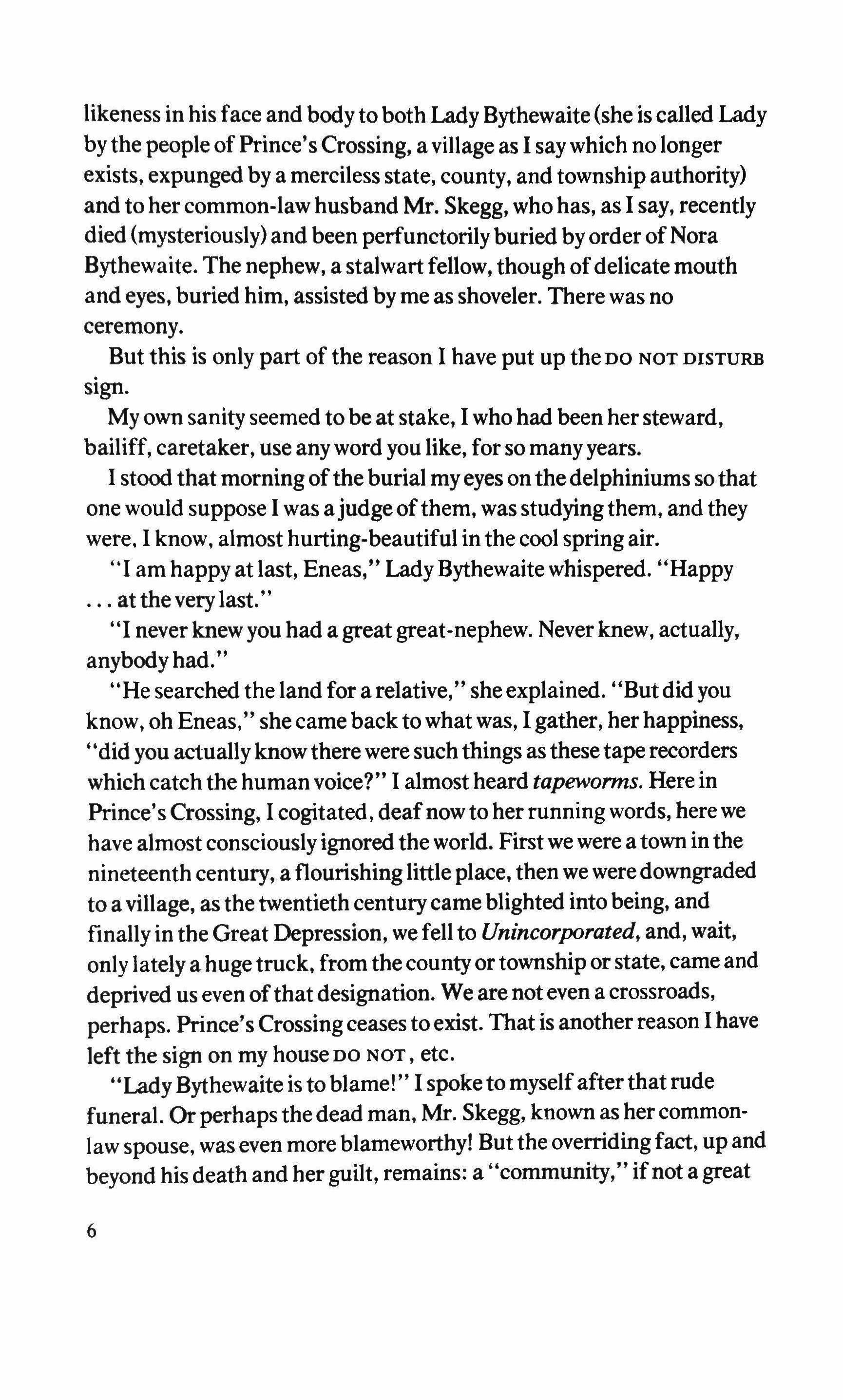
likeness in his face and body to both LadyBythewaite(she is called Lady by the people of Prince's Crossing, a village as I saywhich no longer exists, expunged by a merciless state, county, and townshipauthority) and to her common-law husband Mr. Skegg, who has, as I say, recently died (mysteriously) and been perfunctorily buried byorder ofNora Bythewaite. The nephew, a stalwart fellow, though ofdelicate mouth and eyes, buried him, assisted by me as shoveler. There was no ceremony.
But this is only part of the reason I have put up the DO NOT DISTURB sign.
My own sanity seemed to be at stake, I who had been her steward, bailiff, caretaker, use any word you like, for so many years.
I stood that morning ofthe burial myeyes on the delphiniums so that one would suppose I was ajudgeofthem, was studyingthem, and they were, 1 know, almost hurting-beautiful in the cool spring air.
"I am happy at last, Eneas," LadyBythewaitewhispered. "Happy at thevery last.
"I never knew you had a great great-nephew. Never knew, actually, anybody had."
He searched the land for a relative," she explained.• Butdid you know,oh Eneas," she came back to what was, I gather, herhappiness, did you actually knowthere were suchthings as thesetaperecorders which catch the human voice?" 1 almost heard tapeworms. Here in Prince's Crossing, I cogitated, deaf now to her runningwords, here we have almost consciouslyignored the world. First we were a town inthe nineteenth century, a flourishinglittle place, then we were downgraded to a village, as the twentieth century came blighted into being, and finally in the Great Depression, we fell to Unincorporated, and, wait, onlylately a hugetruck, from thecounty or township or state, came and deprived us even ofthat designation. We are not even a crossroads, perhaps. Prince's Crossing ceases to exist. That is another reason I have left the sign on my house DO NOT, etc.
"LadyBythewaite is to blame!" I spoke to myselfafter that rude funeral. Or perhaps thedead man, Mr. Skegg, known as her commonlaw spouse, was even more blameworthyI But the overridingfact, up and beyond his death and her guilt, remains: a "community," ifnot a great
6
city, has fallen. (LadyBythewaitebeing a staunch individualist eschewed and even loathed the word "community" because it implied using other people's property and talent to loafand dwindle awayon.)
And Mr. Skegg who was the living embodiment ofthis "settlement" (here I avoided the word "community," so under her heavyjurisdiction was I, though it was on my tongue'stip to say).
"Mygreat-great-nephew will be stayingwith me," she had begun that day of his arrival, ushering me into her study, trying to prepare me for thechange in the great house his comingwould effectuate. "Doyou hear what I am saying to you, Eneas Rex Harmond?" she called out to me like a voice in the county seat registrar's office. "Mynephew, be prepared, is like an unwashed say, horse," she took this animal for a comparison after having had on hertongue to say, I do believe, horse in the first place, but almost changingit to goat, not wantingto call him horse for a reason that a listener is more apt to understand when he has heard all her words which went intothewhirlingspools. "There are real nettles, burrs in his hair, I do believe, and-Eneas, are you minding?he is alas using some powerful stimulant But when one's town, one's property" (she lifted hands and eyes to the rafters) "are falling on top of one, I am glad to have almost anybody in this house It is most unusual for me at my age (what was her age?) to see a young man at the breakfast table without anything on at all but a neckerchief. I believe my greatgreat-nephew is good-looking if one washed off all the accumulations of deposit, say dirt Eneas, he is not after my money, I knowthat. He cares nothing for property. I don't knowwhether it is the stimulant he uses or what, but he is indifferent to goods, don't you see, indifferent to all that the world has to offer."
Her voice had gone far fardown on the scale on these last words, like one still talking while falling to sleep.
"But, as we know," she cried comingto with ajumpand start, "Mr. Skegg is dead, and his body lies inthat room yonder. Praystep in and say a last farewell to him
But the nephew came in at that moment, and stopped me from paying my respects. We stood looking at one another in strained embarrassment, LadyBythewaitemaking no move to introduce us to ourselves.
"What is your nephew'S name?" I began at last.
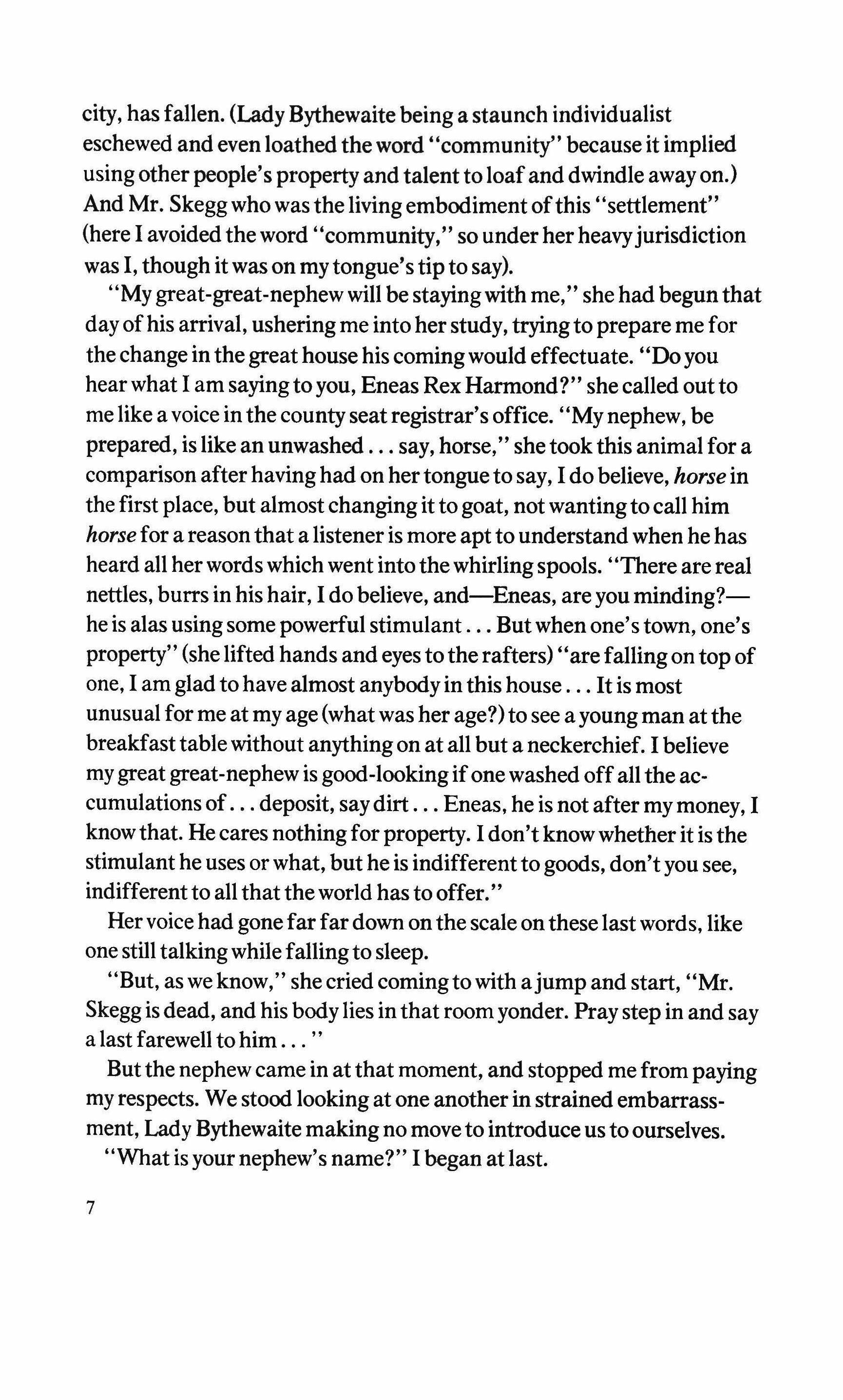
7
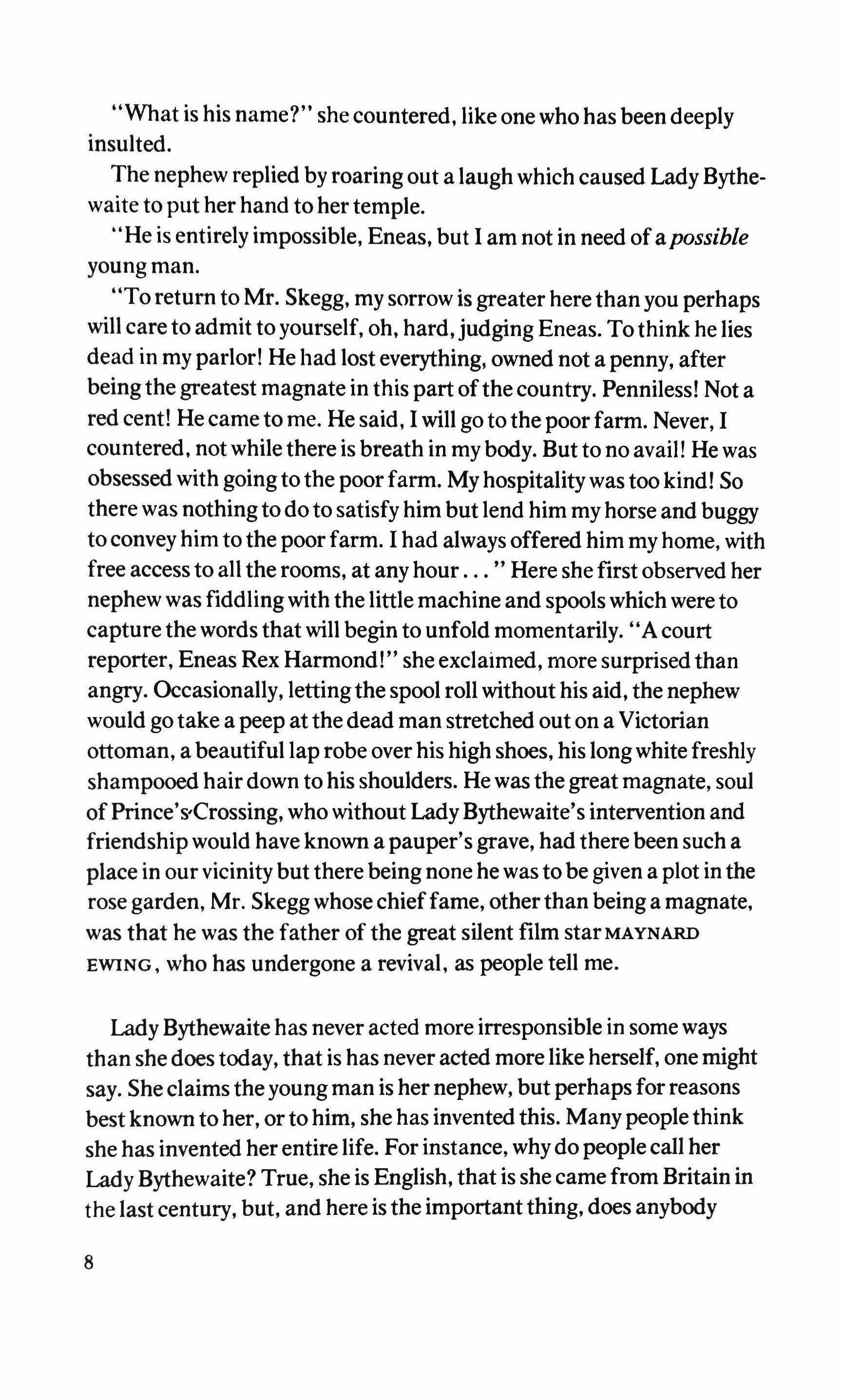
"What is his name?" she countered, like one who has been deeply insulted.
The nephew replied byroaring out a laugh which caused LadyBythewaite to put her hand to her temple He is entirelyimpossible, Eneas, but I am not in need of apossible youngman.
"To return to Mr. Skegg, my sorrow is greater here than you perhaps will care to admit to yourself, oh, hard,judging Eneas. Tothink he lies dead in my parlor! He had lost everything, owned not a penny, after beingthe greatest magnate in this part ofthe country. Penniless! Not a red cent! He came to me. He said, I will go to the poor farm. Never, I countered, not while there is breath in my body. But to no avail! He was obsessed with going to the poor farm. Myhospitality was too kind! So there was nothing to do to satisfy him but lend him myhorse and buggy to convey him to the poor farm. I had always offered him my home, with free access to all the rooms, at any hour Here she first observed her nephew was fiddling with the little machine and spools which were to capture the words that will begin to unfold momentarily. "A court reporter, Eneas Rex Harmond!" she exclaimed, more surprised than angry. Occasionally, lettingthe spool roll without his aid, the nephew would gotake a peep at the dead man stretched out on a Victorian ottoman, a beautiful lap robe over his high shoes, his longwhite freshly shampooed hair down to his shoulders. He was the great magnate, soul ofPrince's-Crossing, who without LadyBythewaite's intervention and friendship would have known a pauper's grave, had there been such a place in our vicinity but there being none he was to be given a plot in the rose garden, Mr. Skegg whose chieffame, other than being a magnate, was that he was the father of the great silent film star MAYNARD EWING, who has undergone a revival, as people tell me.
LadyBythewaite has never acted more irresponsible in some ways than she does today, that is has never acted more like herself, one might say. She claims theyoung man is hernephew, but perhaps for reasons best known to her, or to him, she has invented this. Manypeoplethink she has invented her entire life. For instance, why do people call her LadyBythewaite? True, she is English, that is she came from Britain in the last century, but, and here is the importantthing, does anybody
8
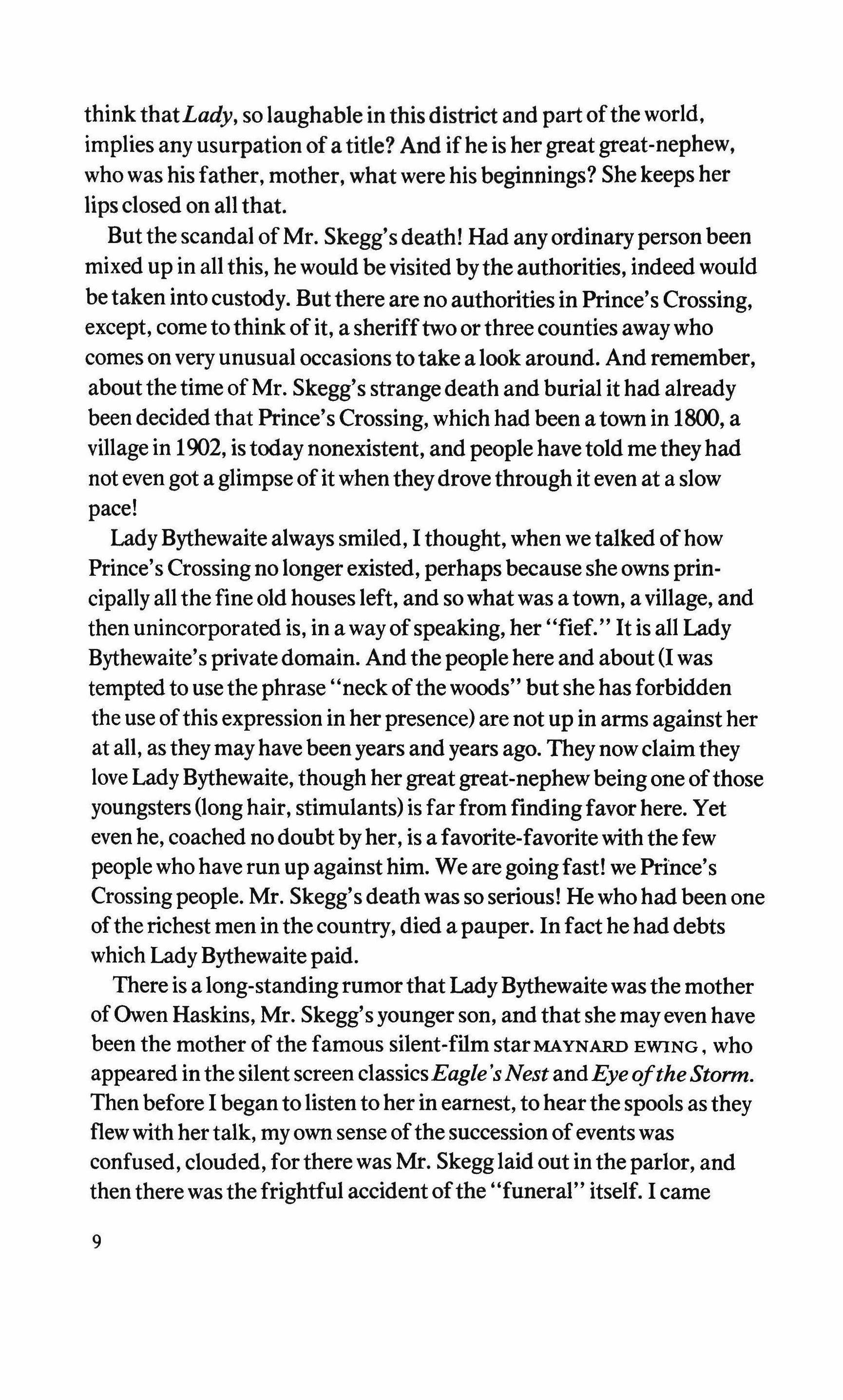
think thatLady, so laughable in this district and part ofthe world, implies any usurpation of a title? And ifhe is her greatgreat-nephew, who was his father, mother, what were his beginnings? She keeps her lips closed on all that.
But the scandal of Mr. Skegg's death! Had any ordinaryperson been mixed up in all this, hewould be visited bythe authorities, indeed would betaken into custody. Butthere are no authorities in Prince's Crossing, except, come tothink of it, a sherifftwo or three counties away who comes on very unusual occasions totake a look around. And remember, about thetime of Mr. Skegg's strange death and burial it had already been decided that Prince's Crossing, which had been a town in 1800, a village in 1902, istodaynonexistent, and people have told me theyhad not even got a glimpse ofitwhentheydrove through it even at a slow pace!
LadyBythewaitealways smiled, I thought, when we talked ofhow Prince's Crossing no longerexisted, perhaps because she owns principally allthe fine old houses left, and so what was a town, a village, and then unincorporatedis, in a way ofspeaking, her "fief." It is all Lady Bythewaite'sprivatedomain. And the people here and about (I was tempted to use the phrase "neckofthe woods" but she has forbidden the use ofthis expression in her presence) are not up in arms against her at all, as they may have been years and years ago. They now claimthey love LadyBythewaite,though her greatgreat-nephewbeing one ofthose youngsters(longhair, stimulants)is farfrom findingfavor here. Yet even he, coached no doubt byher, is a favorite-favorite with the few people whohave run up against him. We are goingfast! we Prince's Crossingpeople. Mr. Skegg's death was so serious! He who had been one oftherichest men in thecountry, died a pauper. In fact he had debts which LadyBythewaitepaid.
There is a long-standing rumor that LadyBythewaite was the mother ofOwen Haskins, Mr. Skegg's younger son, and that she may even have been the mother of the famous silent-film star MAYNARD EWING, who appeared in the silent screen classicsEagle'sNestandEyeoftheStorm. Then before I began to listen to her in earnest, to hearthe spools as they flewwith hertalk, my own sense ofthe succession of events was confused, clouded, forthere was Mr. Skegglaid out in the parlor, and then there was thefrightful accident ofthe''funeral" itself. I came
9
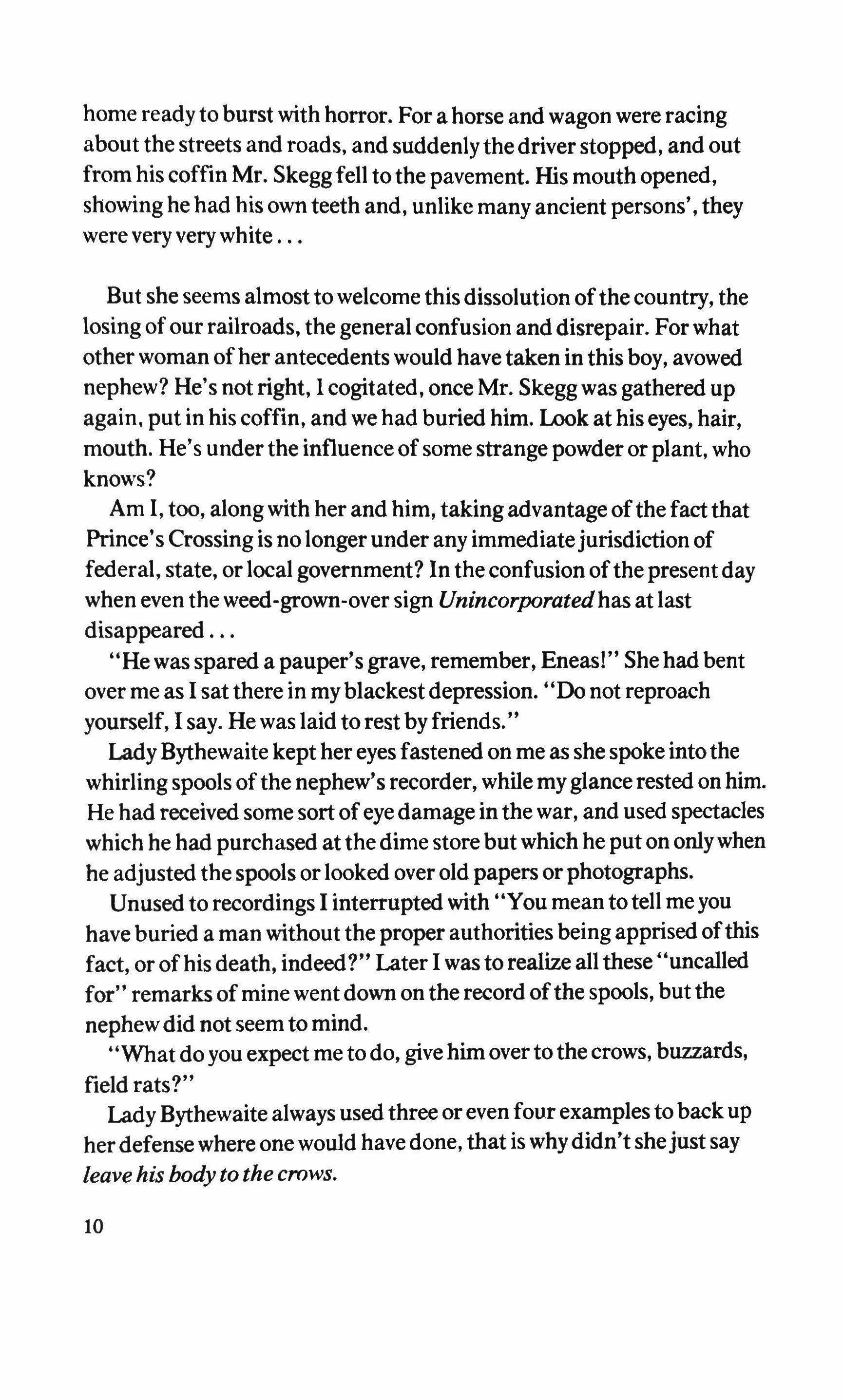
home ready to burst with horror. For a horse and wagon were racing about the streets and roads, and suddenlythedriver stopped, and out from his coffin Mr. Skegg fell to the pavement. His mouth opened, showing he had his own teeth and, unlike many ancient persons', they were very very white
But she seems almost to welcome this dissolution ofthe country, the losing of our railroads, the general confusion and disrepair. Forwhat other woman ofher antecedents would havetaken in this boy, avowed nephew? He's not right, I cogitated, once Mr. Skegg was gathered up again, put in his coffin, and we had buried him. Look at his eyes, hair, mouth. He's under the influence of some strange powder or plant, who knows?
Am I, too, alongwith her and him, takingadvantage ofthe factthat Prince's Crossing is no longer under any immediatejurisdiction of federal, state, or local government? In the confusion ofthe present day when even the weed-grown-oversign Unincorporatedhas at last disappeared
"He was spared a pauper's grave, remember, Eneas!" She had bent over me as I sat there in myblackest depression. "Do not reproach yourself, I say. He was laid to rest byfriends."
LadyBythewaitekept her eyes fastened on me as she spoke intothe whirlingspools ofthe nephew's recorder, while myglance rested on him. He had received some sort ofeye damage inthe war, and used spectacles which he had purchased at the dime store but which he put on onlywhen he adjusted the spools or looked over old papers or photographs.
Unused to recordings I interrupted with "You mean to tell me you have buried a man without the proper authorities beingapprised ofthis fact, or of his death, indeed?" Later I was to realize all these "uncalled for" remarks ofmine went down on the record ofthe spools, butthe nephewdid not seem to mind What do you expect me to do, give him over to the crows, buzzards, field rats?"
LadyBythewaite always used three or even four examples to back up herdefense where one would havedone, that is whydidn't shejust say leavehis body to the crows.
10
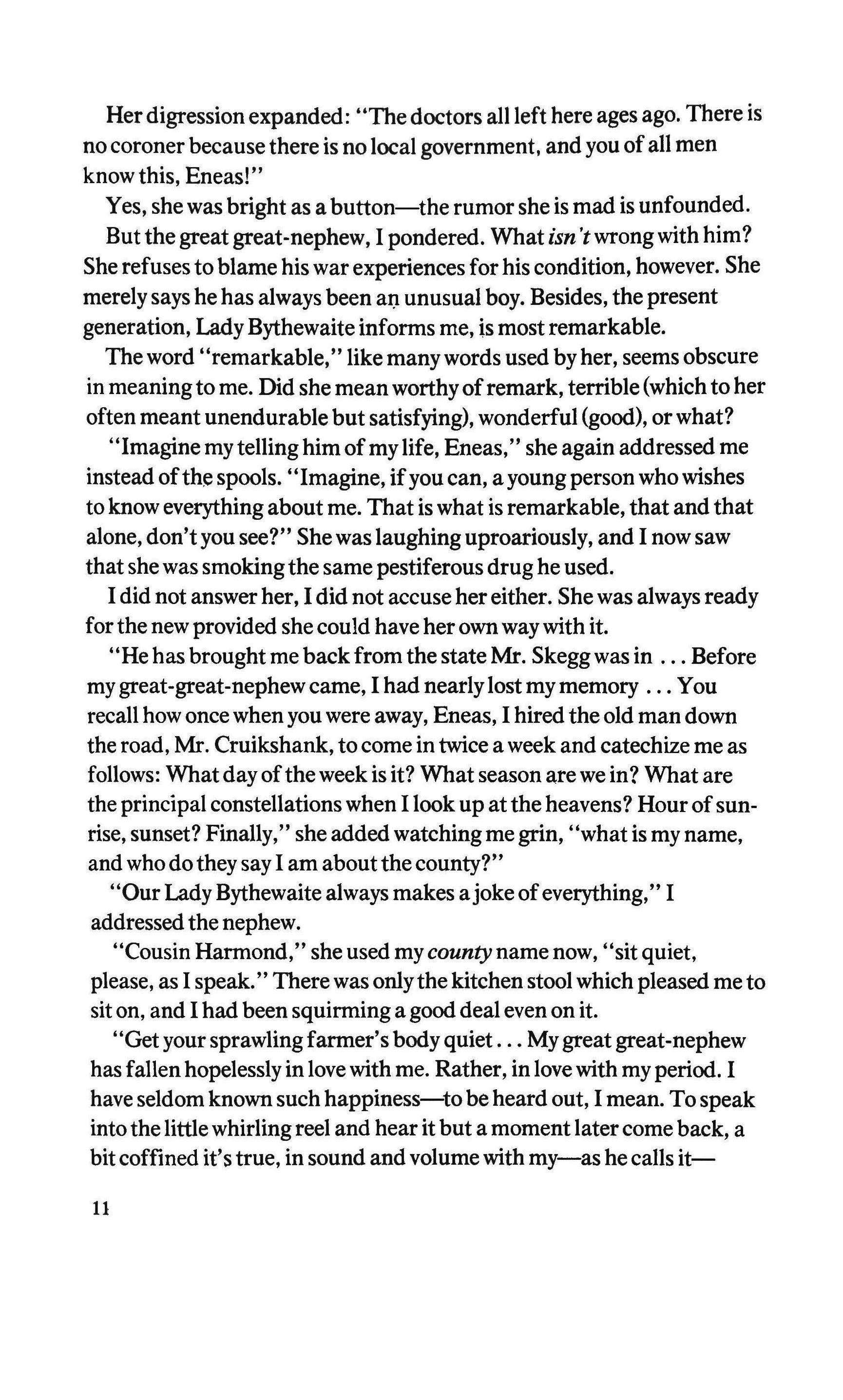
Herdigressionexpanded: "The doctors all left here ages ago. There is no coroner because there is no local government, and you ofall men know this, Eneas!"
Yes, she was bright as a button-the rumor she is mad is unfounded. But the greatgreat-nephew, I pondered. What isn't wrongwith him? She refuses to blame his war experiences forhis condition, however. She merely says he has always been an unusual boy. Besides, the present generation, LadyBythewaite informs me, is most remarkable.
The word''remarkable," like manywords used byher, seems obscure in meaningto me. Did she mean worthyofremark, terrible (which to her often meant unendurablebut satisfying), wonderful (good), or what?
"Imagine my tellinghim ofmylife, Eneas," she again addressed me instead ofthe spools. "Imagine, ifyou can, a young person whowishes to know everything about me. That is what is remarkable, that and that alone, don't you see?" She was laughinguproariously, and I now saw that she was smokingthe same pestiferousdrug he used.
I did not answer her, I did not accuse hereither. She was alwaysready for the new provided she could have her own waywith it.
"He has brought me back from the state Mr. Skegg was in Before my great-great-nephew came, I had nearlylost my memory You recall how once when you were away, Eneas, I hired theold man down the road, Mr. Cruikshank, to come in twice a week and catechize me as follows: Whatdayofthe week is it? What season are we in? What are the principal constellations when I look up at the heavens? Hourof sunrise, sunset? Finally," she added watching me grin, "what is my name, and who dothey say I am about thecounty?"
"Our LadyBythewaitealways makes ajoke ofeverything," I addressedthe nephew.
"Cousin Harmond," she used my county name now, "sit quiet, please, as I speak." There was onlythe kitchen stool which pleased me to sit on, and I had been squirming a good deal even on it.
"Get your sprawlingfarmer's bodyquiet. Mygreatgreat-nephew has fallen hopelessly in love with me. Rather, in lovewith my period. I have seldom known such happiness-to be heard out, I mean. To speak intothe little whirlingreel and hear itbut a moment later come back, a bit coffined it's true, in sound and volumewith my-as he calls it11
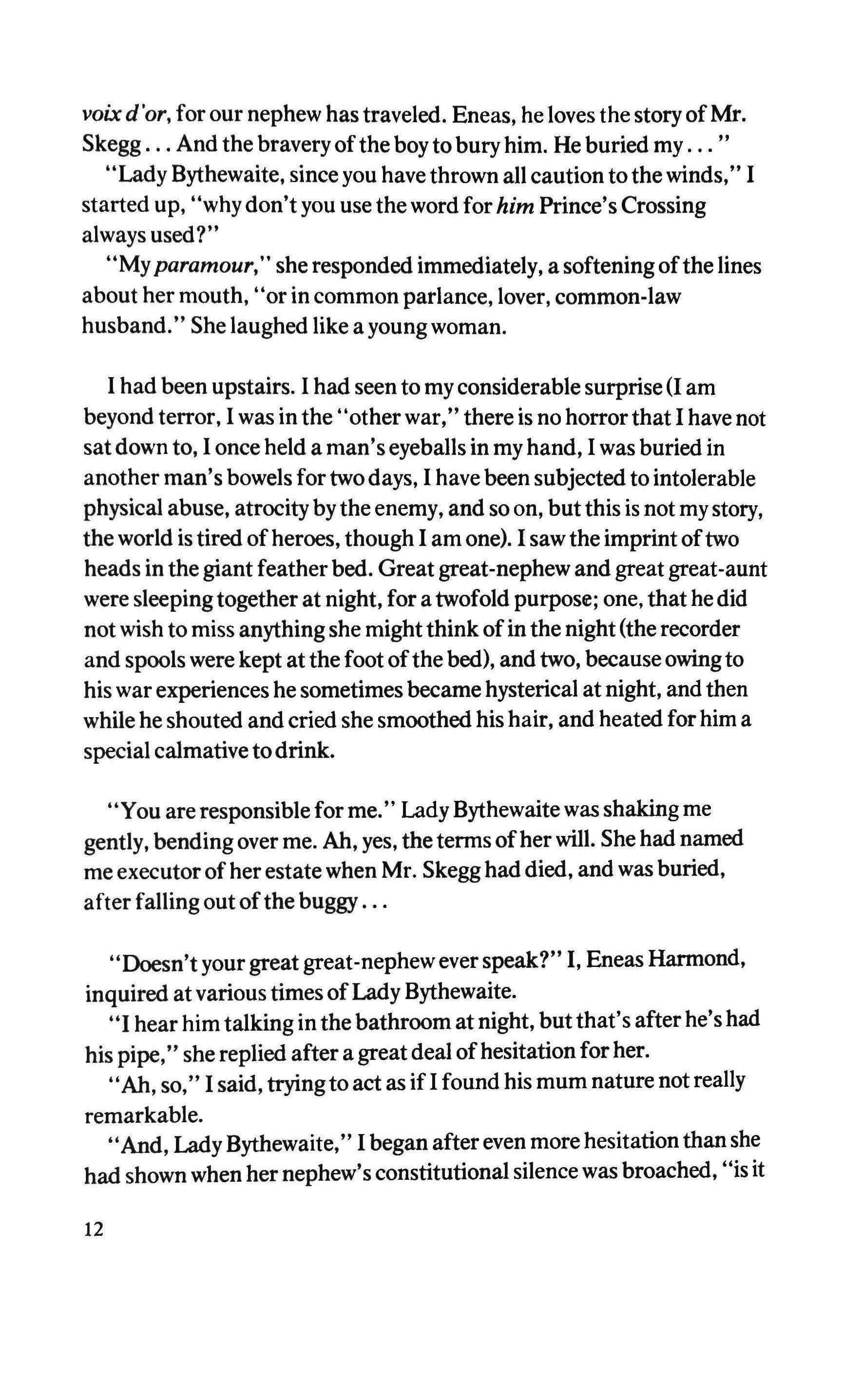
voix d'or, for our nephew has traveled. Eneas, he loves the story ofMr. Skegg And the braveryofthe boy to buryhim. He buried my "LadyBythewaite, since you have thrown all caution to thewinds," I started up, "whydon't you use the word forhim Prince's Crossing always used?"
"Myparamour," she respondedimmediately, a softeningofthe lines about her mouth, "or in common parlance, lover, common-law husband." She laughed like a young woman.
I had been upstairs. I had seen to my considerable surprise(I am beyond terror, I was in the" otherwar," there is no horror that I have not sat down to, I once held a man's eyeballs in my hand, I was buried in another man's bowels for two days, I have been subjected to intolerable physical abuse, atrocitybythe enemy, and so on, butthis is not my story, the world is tired ofheroes, though I am one). I saw the imprint oftwo heads in the giant featherbed. Great great-nephew and greatgreat-aunt were sleepingtogether at night, for a twofold purpose; one, that he did not wish to miss anything she mightthink ofinthe night(the recorder and spools were kept at the foot ofthe bed), and two, becauseowingto his war experiences he sometimes became hysterical at night, and then while he shouted and cried she smoothed his hair, and heated forhim a special calmative todrink.
You are responsiblefor me. " LadyBythewaite was shaking me gently,bending over me. Ah, yes, the terms ofher will. She had named me executor ofher estate when Mr. Skegghad died, and was buried, after falling out ofthe buggy
"Doesn't your greatgreat-nephew ever speak?" I, Eneas Harmond, inquired at various times ofLady Bythewaite
I hear him talking inthebathroom at night, butthat's after he'shad his pipe," she replied after a great deal ofhesitationfor her.
"Ah, so," I said, tryingto act as if I found his mum nature not really remarkable
And, LadyBythewaite," I began after even more hesitation than she had shown when her nephew's constitutional silence was broached, "is it
12
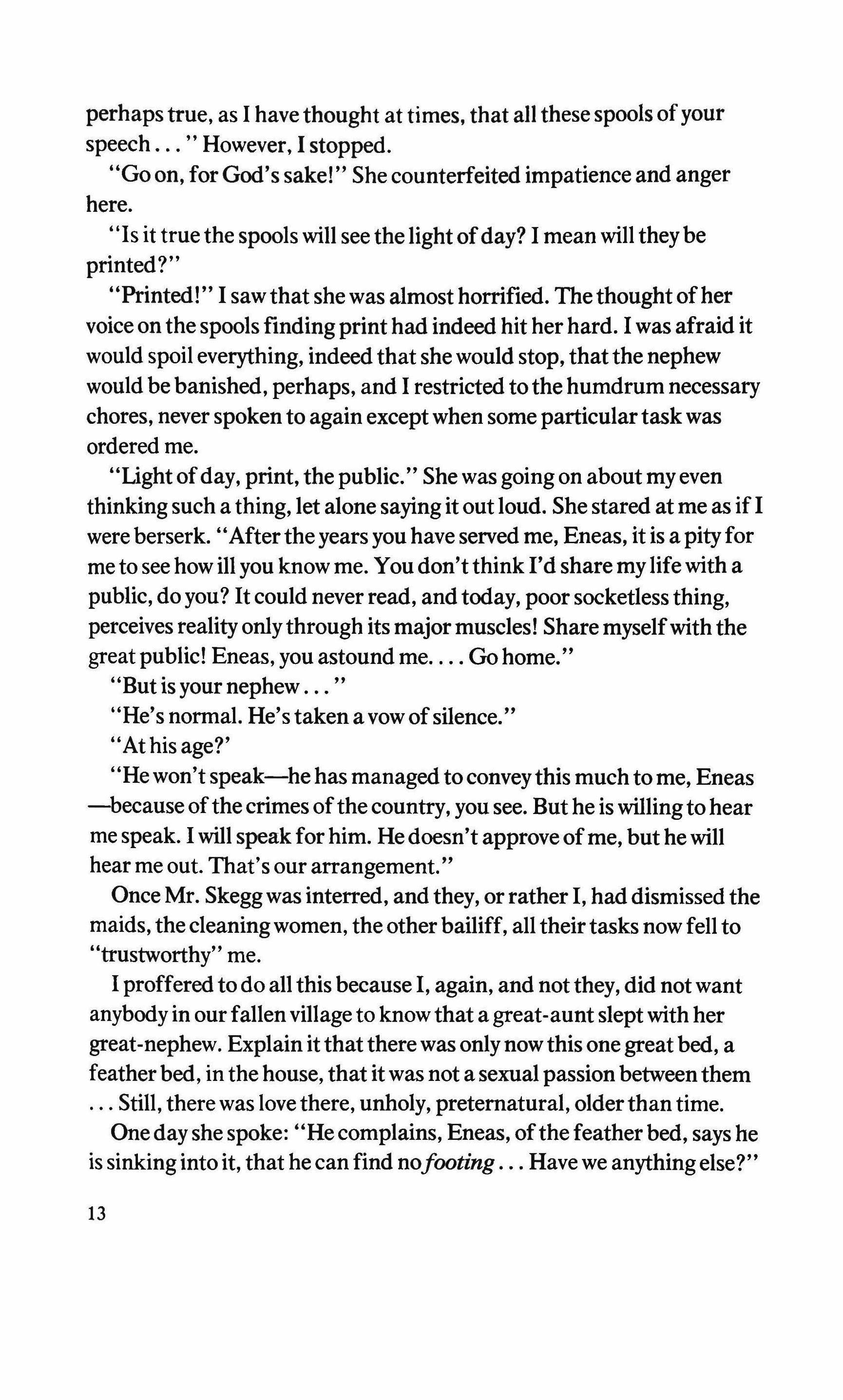
perhaps true, as I havethought at times, that all these spools ofyour speech "However, I stopped.
"Go on, for God's sake!" She counterfeited impatience and anger here.
"Is it true the spools will see the light ofday? I mean will theybe printed?"
"Printed!" I saw that she was almost horrified. Thethought ofher voice on the spoolsfindingprint had indeed hit her hard. I was afraid it would spoileverything, indeed that she would stop, thatthe nephew would be banished, perhaps, and I restricted to the humdrum necessary chores, never spoken to again exceptwhen some particulartask was ordered me.
"Light ofday, print, the public." She was going on about my even thinking such a thing, let alone sayingit out loud. She stared at me as if I were berserk. "Afterthe years you have served me, Eneas, it is a pityfor me to see howill you know me. You don'tthink I'd share my lifewith a public, do you? It could never read, and today, poor socketless thing, perceivesrealityonlythrough its majormuscles! Share myselfwith the greatpublic! Eneas, you astound me Go home."
"But is your nephew "
"He's normal. He's taken a vow ofsilence."
"At his age?'
"Hewon't speak-he has managed to conveythis much to me, Eneas -because ofthecrimes ofthe country, you see. But he is willingto hear me speak. I will speak for him. He doesn't approveofme, but he will hear me out. That's our arrangement."
Once Mr. Skeggwas interred, and they, or rather I, had dismissed the maids, thecleaning women, the other bailiff, all their tasks now fell to "trustworthy" me.
I proffered to do all this because I, again, and not they, did not want anybody in our fallen village to know that a great-auntslept with her great-nephew. Explain itthatthere was only now this one greatbed, a featherbed, in the house, that it was not a sexual passion between them Still, there was love there, unholy, preternatural, olderthan time.
One day she spoke: "Hecomplains, Eneas, ofthe feather bed, says he is sinkingintoit, that he can find nofooting Have we anythingelse?"
13
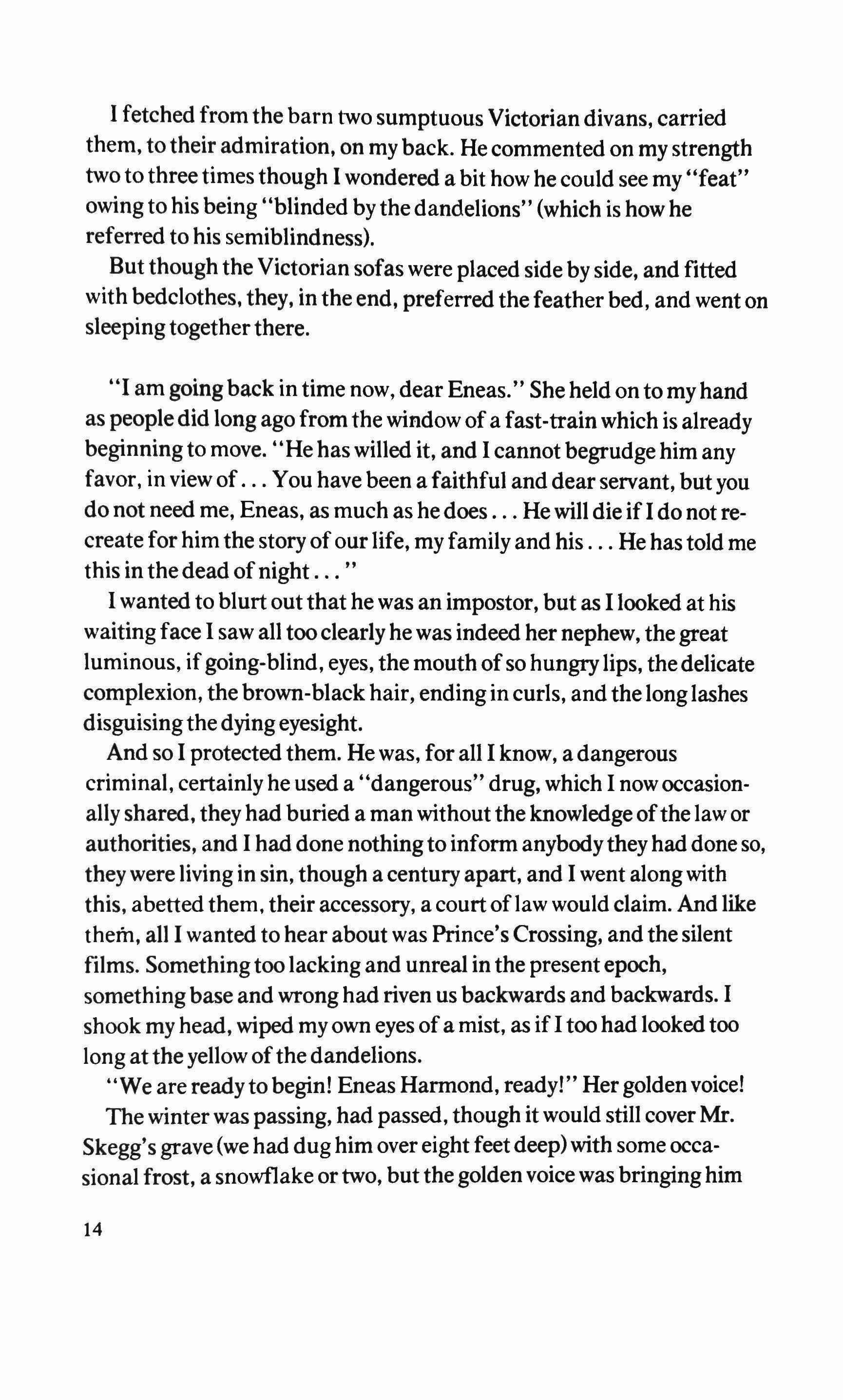
I fetched from the barn two sumptuous Victorian divans, carried them, to their admiration, on my back. He commented on my strength two to three times though I wondered a bit how he could see my "feat" owing to his being "blinded by the dandelions" (which is how he referred to his serniblindness),
But though the Victorian sofas were placed side by side, and fitted with bedclothes, they, in the end, preferred the feather bed, and went on sleepingtogetherthere.
"I am goingback in time now, dear Eneas." She held on to my hand as peopledid long ago from the window of a fast-train which is already beginning to move. "He has willed it, and 1 cannot begrudge him any favor, in view of You have been a faithful and dear servant, but you do not need me, Eneas, as much as hedoes He will die if1 do not recreate for him the story of our life, my family and his He has told me this in thedead ofnight
I wanted to blurt out that he was an impostor, but as 1 looked at his waiting face 1 sawall too clearly he was indeed her nephew, the great luminous, ifgoing-blind, eyes, the mouth of so hungrylips, thedelicate complexion, the brown-black hair, ending in curls, and the longlashes disguisingthe dyingeyesight.
And so 1 protected them. He was, for all 1 know, a dangerous criminal, certainly he used a "dangerous" drug, which 1 nowoccasionally shared, they had buried a man without the knowledge ofthe law or authorities, and I had done nothing to inform anybodythey had done so, they were living in sin, though a centuryapart, and I went alongwith this, abetted them, their accessory, a court oflaw would claim. And like thein, all 1 wanted to hear about was Prince's Crossing, and the silent films. Something too lacking and unreal in the presentepoch, something base and wrong had riven us backwards and backwards. 1 shook my head, wiped my own eyes of a mist, as if I too had looked too long at the yellow ofthe dandelions.
"We are ready to begin! Eneas Harmond, ready!" Her golden voice! The winter was passing, had passed, though it would still cover Mr. Skegg's grave (we had dug him over eight feet deep)with some occasional frost, a snowflake or two, but the goldenvoice was bringinghim
14
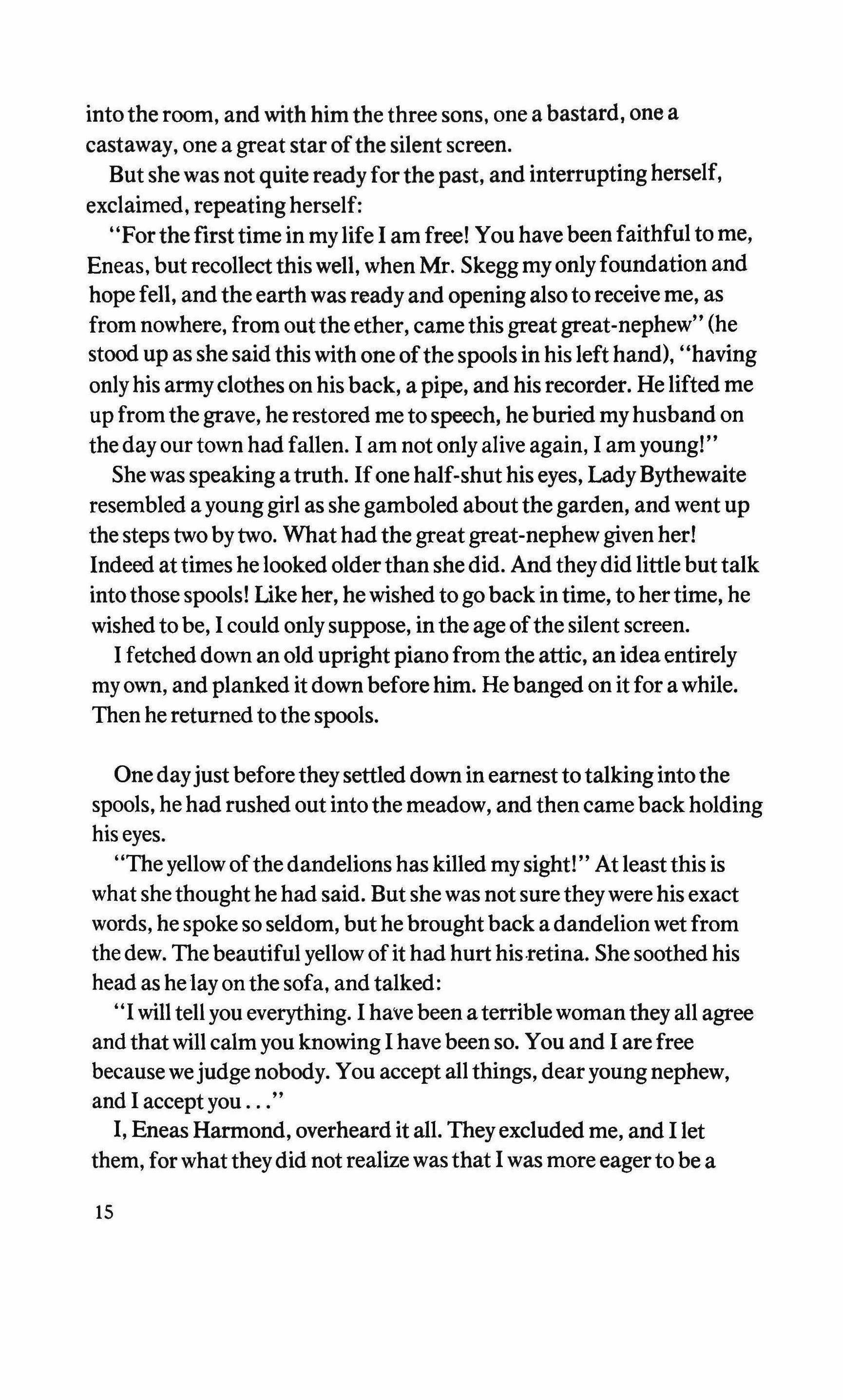
intothe room, and with him the three sons, one a bastard, one a castaway, one a great star ofthe silent screen.
But she was not quiteready forthe past, and interruptingherself, exclaimed, repeatingherself:
"For thefirsttime in my life I am free! You have been faithful to me, Eneas, but recollect thiswell, when Mr. Skegg my onlyfoundation and hopefell, and the earth was ready and opening also to receive me, as from nowhere, from out the ether, came this greatgreat-nephew" (he stood up as she said this with one ofthe spools in his left hand), "having onlyhis armyclothes on his back, a pipe, and his recorder. He lifted me up from the grave, he restored me to speech, he buried myhusband on the day our town had fallen. I am not only alive again, I am young!"
She was speaking a truth. If one half-shut his eyes, LadyBythewaite resembled a younggirl as she gamboled about the garden, and went up the steps two bytwo. What had the greatgreat-nephewgiven her! Indeed at times he looked older than she did. And theydid little but talk intothose spools! Like her, he wished to go back in time, to hertime, he wished to be, I could only suppose, inthe age ofthe silent screen.
I fetched down an old uprightpiano from the attic, an ideaentirely my own, and planked it down before him. He banged on it for a while. Then he returned to the spools.
One dayjust beforetheysettled down in earnest to talkinginto the spools, he had rushed out intothe meadow, and then came back holding his eyes.
"Theyellowofthe dandelions has killed my sight!" At least this is what shethought he had said. But she was not sure they were his exact words, he spoke so seldom, but he brought back a dandelion wet from the dew. The beautiful yellow ofit had hurt hisretina, She soothed his head as helay on the sofa, and talked:
"I will tell you everything. I have been a terrible woman they all agree and thatwill calm you knowing I have been so. You and I are free because we judgenobody. You accept all things, dearyoungnephew, and I accept you "
I, Eneas Harmond, overheard it all. Theyexcluded me, and I let them, for whatthey did not realize was that I was more eager to be a
15

witness than he to hear or she to tell But because ofthe strain of my devotion, well, sometimes I wilted before them, yes that is the right word, my head fell over from my sittingposture, and then in pityofthat devotion, they handed me the pipe. and I smoked with them, sitting finally away from them on the floor, while she went on with her gold voice telling and telling and while he held his eyes from the pain ofthe dandelions.
"I fear. Eneas, he will lose his sight." She took me aside while he fiddled with the spools. "Perhaps you could go to the dime store in some nearbyvillage and get him stronger specs."
I raised and lowered my head. I knew it was useless to mention a doctor, theywould not allow one to set foot in the house, and then there wasn't one for fiftymiles in any case.
I noticed LadyBythewaite was making clothes for him, for he had only his army fatigues to cover his spare sinewy form. I will not say that then the scales fell from my eyes, but I realized with each new "meeting" with them that all we have learned about women is false, maybethey taught it to us false to hide from us whothey are, butthis naked robin of a great great-nephew had brought back fromthe longago a woman I did not know, the same woman whose story was beingrecited intothe whirlingspools. I don't know which I observed more, the alleged nephew with his glaucous eyes "spoiledbythe effulgence ofthedandelions" (" He went blind from looking at these harmless meadowweeds," she keptwhispering to me), or the dew-fresh aunt who sleptwith him, ate with him, was never out ofhis presence, and though he almost never opened his mouth to say a word. employing a grunt now and then when he wished her to stop talkinglongenough for him to change a spool of the recorder so that we could go on with the glories ofMaynard Ewing, and the old magnate, Mr. Skegg, or "maggot" as theypronounced the word magnate in Prince's Crossing.
Touching on Mr. Skegg, she said: "He refused to pity me when I told him I was pregnantby him!" "Pregnantby me, mychild," he had stormed, "when hardly a night passes while I'm out driving I don't see you in some ditch with a farmer's son Takethose pathetictales back to England with you She shipped you here because you knew your
16
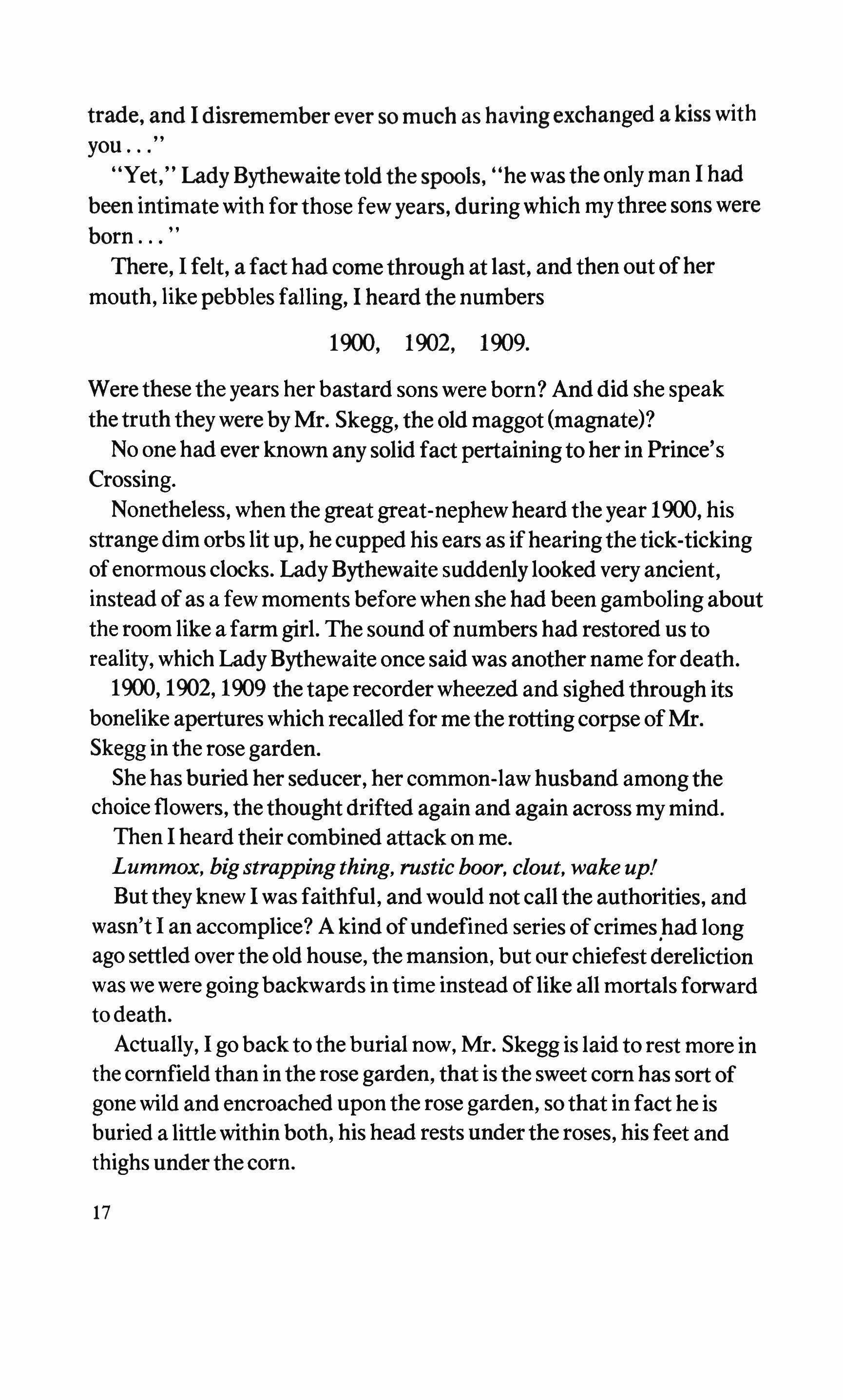
trade, and I disremember ever so much as havingexchanged a kiss with you
"Yet," LadyBythewaite told the spools, "he was the only man I had been intimatewith forthose few years, duringwhich my three sons were born "
There, I felt, a fact had come through at last, and then out ofher mouth, like pebblesfalling, I heard the numbers 1900, 1902, 1909.
Were thesethe years her bastard sons were born? And did she speak thetruth they were by Mr. Skegg, the old maggot(magnate)?
No one had ever known any solid fact pertaining to her in Prince's Crossing.
Nonetheless, when the greatgreat-nephewheard the year 1900, his strange dim orbs lit up, he cupped his ears as ifhearingthetick-ticking of enormous clocks. LadyBythewaitesuddenly looked very ancient, instead of as a few moments before when she had been gamboling about the room like a farm girl. The sound ofnumbers had restored us to reality, which LadyBythewaite once said was another name fordeath. 1900, 1902, 1909 the tape recorder wheezed and sighedthrough its bonelike apertures which recalled for me therotting corpse ofMr. Skegg in the rose garden.
She has buried her seducer, her common-law husband among the choice flowers, thethought drifted again and again across my mind. Then I heard their combined attack on me.
Lummox, bigstrappingthing, rustic boor, clout, wake up!
But they knew I was faithful, and would not call the authorities, and wasn't I an accomplice? A kind ofundefined series ofcrimeshadlong ago settled over the old house, themansion, but our chiefest dereliction was we were goingbackwards in time instead oflike all mortals forward to death.
Actually, I go back to the burial now, Mr. Skegg is laid to rest more in the cornfield than in the rose garden, that is the sweet corn has sort of gone wild and encroached upon the rose garden, so that in fact he is buried a little within both, his head rests under the roses, his feet and thighs under the corn.
17
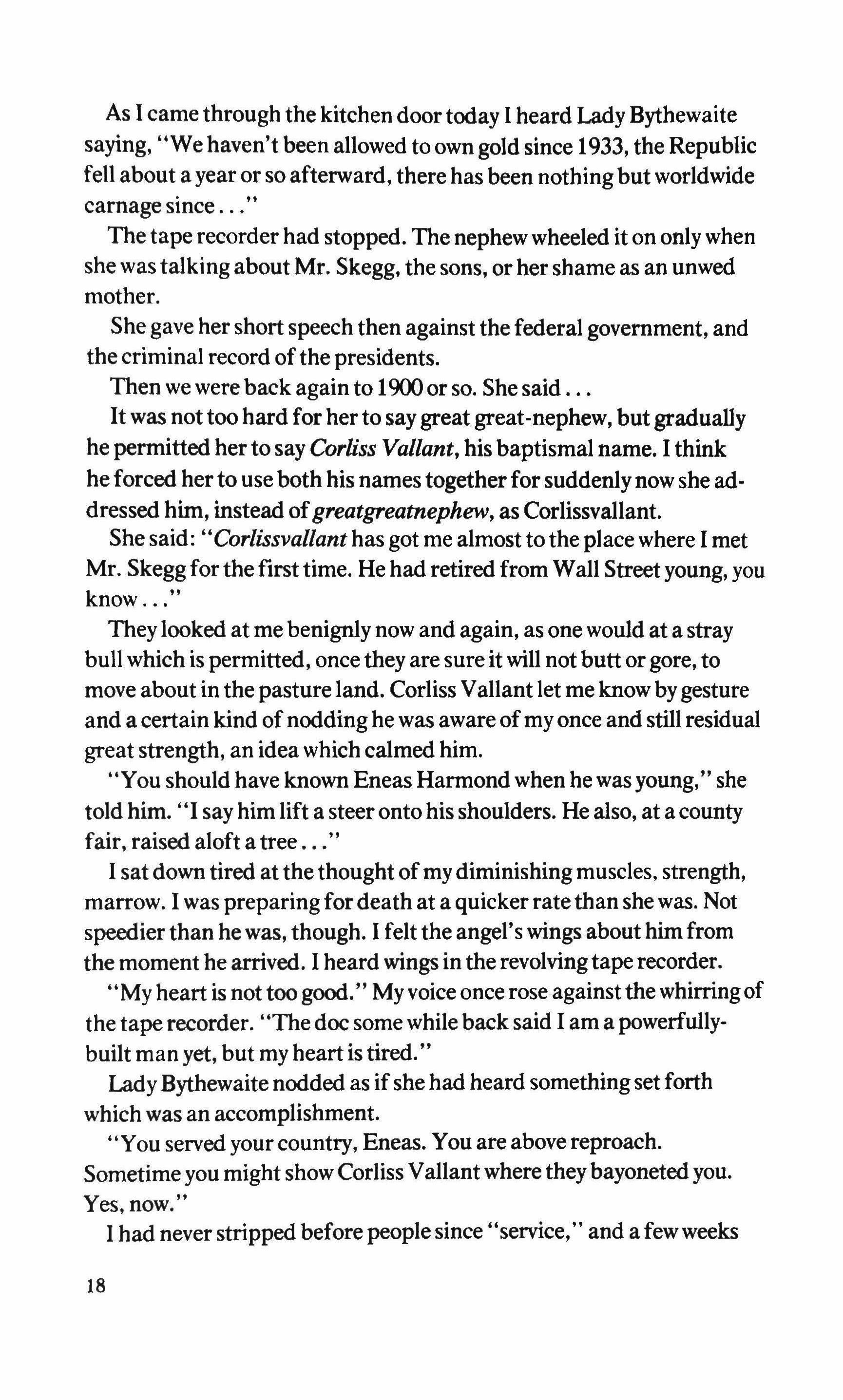
As 1 came through the kitchen door today I heard Lady Bythewaite saying, "We haven't been allowed to own gold since 1933, the Republic fell about a year or so afterward, there has been nothingbut worldwide carnage since
The tape recorder had stopped. The nephewwheeled it on only when she was talkingabout Mr. Skegg, the sons, or her shame as an unwed mother.
She gave her short speech then against the federal government, and the criminal record ofthe presidents.
Then we were back again to 1900 or so. She said It was not too hard for her to saygreatgreat-nephew, but gradually he permitted her to say Corliss Valiant, his baptismal name. 1 think he forced her to use both his names togetherfor suddenly now she addressed him, instead ofgreatgreatnephew, as Corlissvallant.
She said: "Corlissvallant has got me almost to the place where I met Mr. Skeggforthe firsttime. He had retired from Wall Street young, you know
Theylooked at me benignly now and again, as one would at a stray bull which is permitted, once they are sure it will not butt or gore, to move about in the pasture land. Corliss ValIant let me know bygesture and a certain kind of noddinghe was aware ofmy once and still residual great strength, an idea which calmed him.
"You should have known Eneas Harmond when he was young," she told him. "I say him lift a steer onto his shoulders. He also, at a county fair, raised aloft a tree
I sat down tired at thethought ofmy diminishingmuscles. strength, marrow. 1 was preparing fordeath at a quicker rate than she was. Not speedier than he was, though. 1 felt the angel'swings about himfrom the moment he arrived. 1 heard wings in the revolvingtape recorder.
"My heart is not too good." Myvoice once rose againstthe whirringof the tape recorder. "The doc some while back said 1 am a powerfullybuilt man yet, but my heart is tired."
Lady Bythewaite nodded as ifshe had heard something set forth which was an accomplishment. You served your country, Eneas. You are above reproach. Sometime you might showCorliss ValIant where theybayoneted you. Yes,now."
I had never stripped before people since "service," and a fewweeks
18
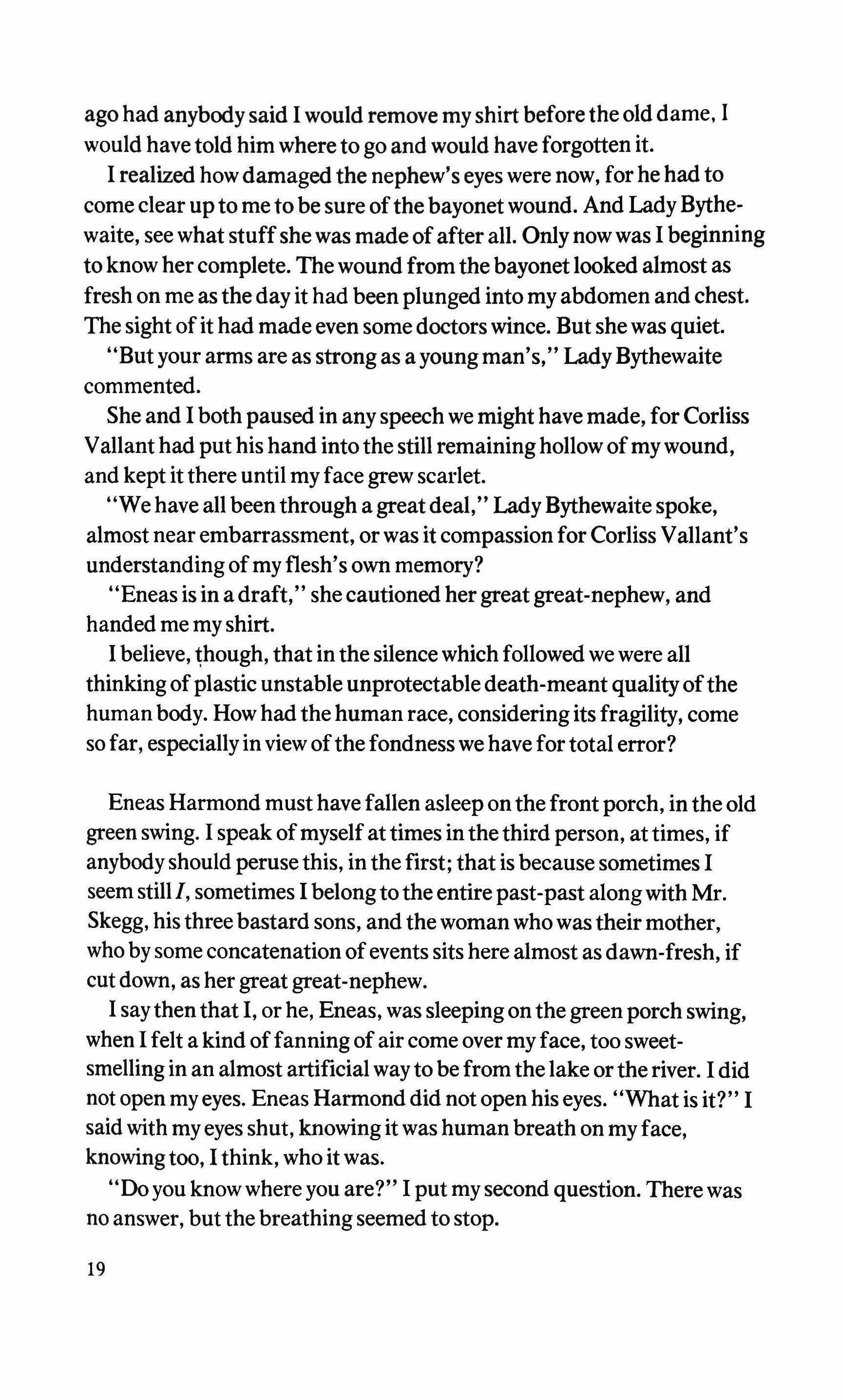
ago had anybodysaid I would remove my shirt before the old dame, I would have told him where to go and would have forgotten it.
I realized howdamaged the nephew's eyes were now, for he had to come clear up to me to be sure ofthe bayonet wound. And LadyBythewaite, see what stuffshe was made ofafter all. Only now was I beginning to know hercomplete. The wound fromthe bayonet looked almost as fresh on me as the day it had been plunged into my abdomen and chest. The sight ofit had made even some doctors wince. But she was quiet.
"But your arms are as strong as a youngman's," LadyBythewaite commented.
She and I both paused in any speech we might have made, forCorliss ValIant had puthis hand into the still remaininghollow ofmywound, and kept itthere until my face grew scarlet.
"We have all been through a greatdeal," LadyBythewaitespoke, almost near embarrassment, or was it compassion for Corliss ValIant's understanding ofmy flesh's own memory?
"Eneas is in a draft," she cautioned her greatgreat-nephew, and handed me my shirt.
I believe, though, that inthe silence which followed we were all thinking ofplastic unstable unprotectable death-meant qualityofthe human body. How had the human race, consideringits fragility, come so far, especially in view ofthe fondness we have fortotal error?
Eneas Harmond must have fallen asleep on thefront porch, in the old green swing. I speak ofmyself at times in thethird person, at times, if anybody should perusethis, in the first; that is because sometimes I seem stillI, sometimes I belong to the entire past-past alongwith Mr. Skegg, his threebastard sons, and the woman who was their mother, who by some concatenation of events sits here almost as dawn-fresh, if cut down, as her greatgreat-nephew.
I saythenthat I, or he, Eneas, was sleeping on the green porch swing, when I felt a kind offanning of air come over my face, too sweetsmelling in an almost artificial way to be from thelake or the river. I did not open my eyes. Eneas Harmond did not open his eyes. "What is it?" I said with my eyes shut, knowingit was human breath on my face, knowing too, I think, who it was.
"Do you knowwhere you are?" I put my second question. There was no answer, but the breathing seemed to stop.
19
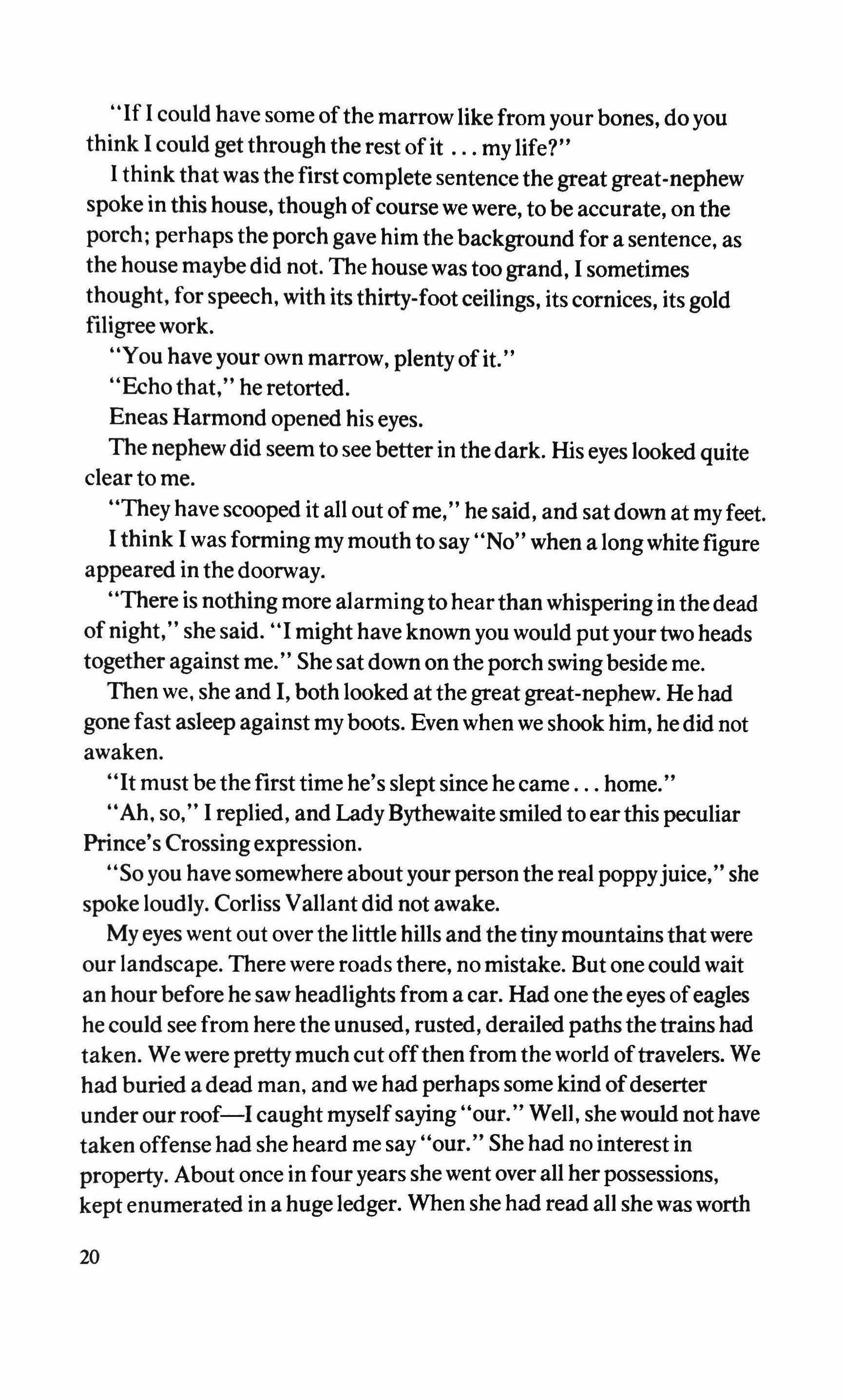
"If I could have some ofthe marrow like from your bones, do you think I could get through the rest ofit my life?"
I think that was the first complete sentence the greatgreat-nephew spoke in this house, though of course we were, to be accurate, on the porch; perhaps the porch gave him the background for a sentence, as the house maybe did not. The house was too grand, I sometimes thought, for speech, with its thirty-footceilings, its cornices, its gold filigree work.
You have your own marrow, plentyofit."
"Echo that," he retorted.
Eneas Harmond opened his eyes.
The nephew did seem to see better in the dark. His eyes looked quite clear to me.
"They have scooped it all out ofme," he said, and sat down at my feet.
I think I was forming my mouth to say "No" when a longwhite figure appeared in thedoorway.
"There is nothing more alarming to hearthan whispering in thedead ofnight," she said. "I might have known you would put your two heads togetheragainst me." She sat down on the porch swingbeside me.
Then we, she and I, both looked at the great great-nephew. He had gone fast asleepagainst myboots. Even when we shook him, hedid not awaken.
"It must bethe first time he's slept since he came home."
"Ah, so," I replied, and LadyBythewaite smiled to ear this peculiar Prince's Crossingexpression.
"So you have somewhere about your person the real poppyjuice," she spoke loudly. Corliss Valiant did not awake.
My eyes went out over the little hills and thetinymountains that were our landscape. There were roads there, no mistake. But one could wait an hourbefore he saw headlights from a car. Had one the eyes ofeagles he could see from here the unused, rusted, derailed paths thetrains had taken. We were pretty much cut offthen from the world oftravelers. We had buried a dead man, and we had perhaps some kind ofdeserter under our roof-I caughtmyselfsaying "our." Well, she would not have taken offense had she heard me say "our." She had no interest in property. About once in fouryears she went over all her possessions, kept enumerated in a hugeledger. When she had read all she was worth
20
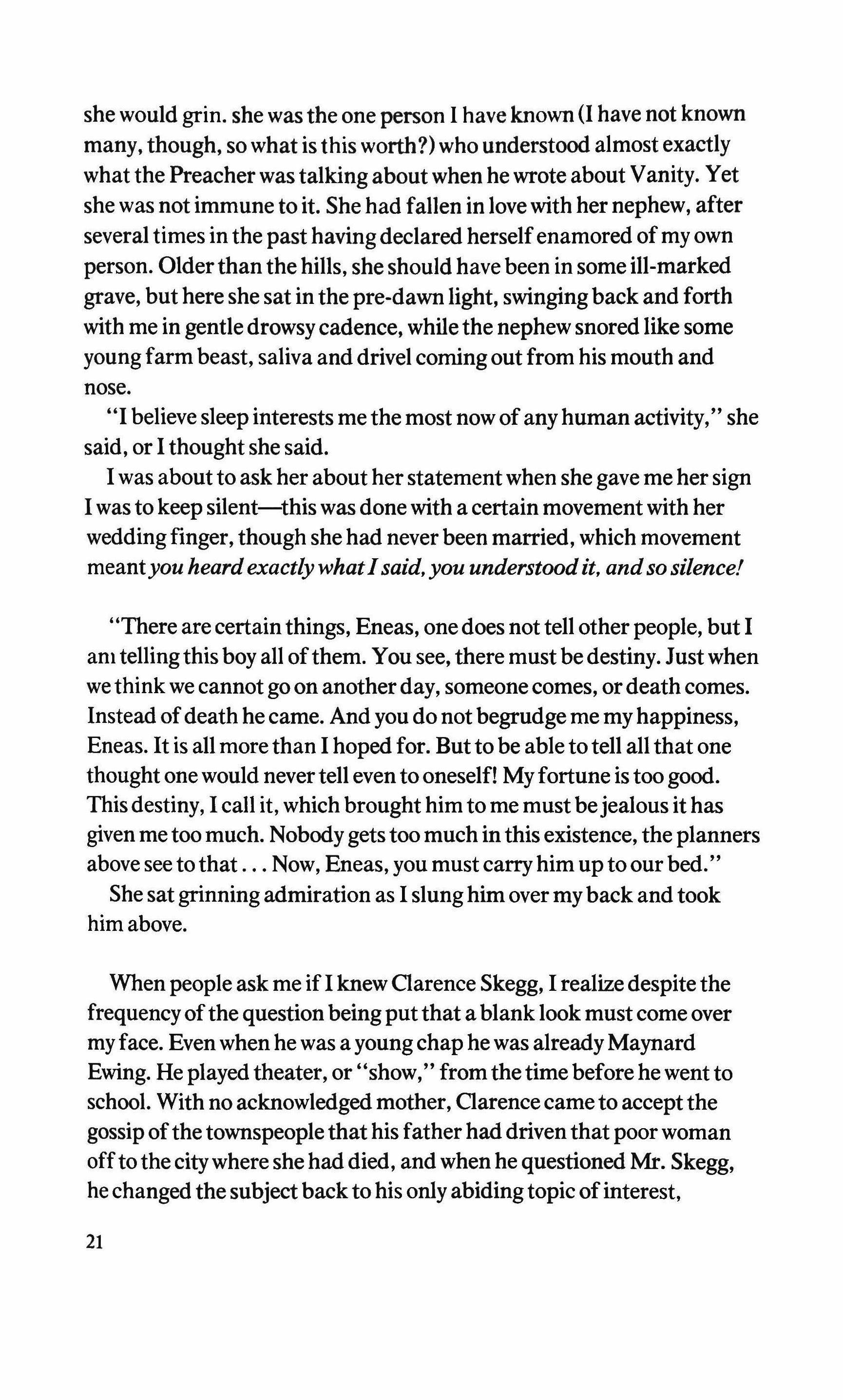
she would grin. she was the one person I have known (l have not known many, though, so what is this worth?) who understood almost exactly what the Preacher was talking about when he wrote about Vanity. Yet she was not immune to it. She had fallen in lovewith her nephew, after several times in the pasthavingdeclared herselfenamored of my own person. Olderthan the hills, she should have been in some ill-marked grave, but here she sat inthe pre-dawnlight, swingingback and forth with me in gentledrowsycadence, whilethe nephew snored like some young farm beast, saliva and drivel coming out from his mouth and nose.
"I believe sleep interests me the most now of any human activity," she said, or I thought she said.
I was about to ask her about her statement when she gave me her sign I was to keep silent-this was done with a certain movement with her weddingfinger,though she had never been married, which movement meantyou heardexactlywhatIsaid, you understoodit, and so silence!
"There are certainthings, Eneas, one does not tell other people, but I am tellingthisboy all ofthem. You see, there must bedestiny. Justwhen we think we cannot go on anotherday, someone comes, or death comes. Instead ofdeath he came. And you do not begrudge me my happiness, Eneas. It is all more than I hoped for. But to be able to tell all that one thought one would never tell even to oneself! Myfortune is too good. Thisdestiny, I call it, which brought him to me must bejealous it has given me too much. Nobodygets too much inthis existence, the planners above see to that Now, Eneas, you must carry him up to our bed."
She sat grinning admiration as I slunghim over myback and took him above.
When people ask me ifI knew Clarence Skegg, I realize despite the frequencyofthe questionbeingputthat a blank look must come over myface. Even when he was a youngchap he was alreadyMaynard Ewing. He playedtheater, or "show," from thetime before he went to school. With no acknowledgedmother, Clarence came to acceptthe gossip ofthe townspeoplethat his father had driven that poor woman offto the citywhere she had died, and when he questioned Mr. Skegg, he changed the subject backto his onlyabidingtopic ofinterest,
21
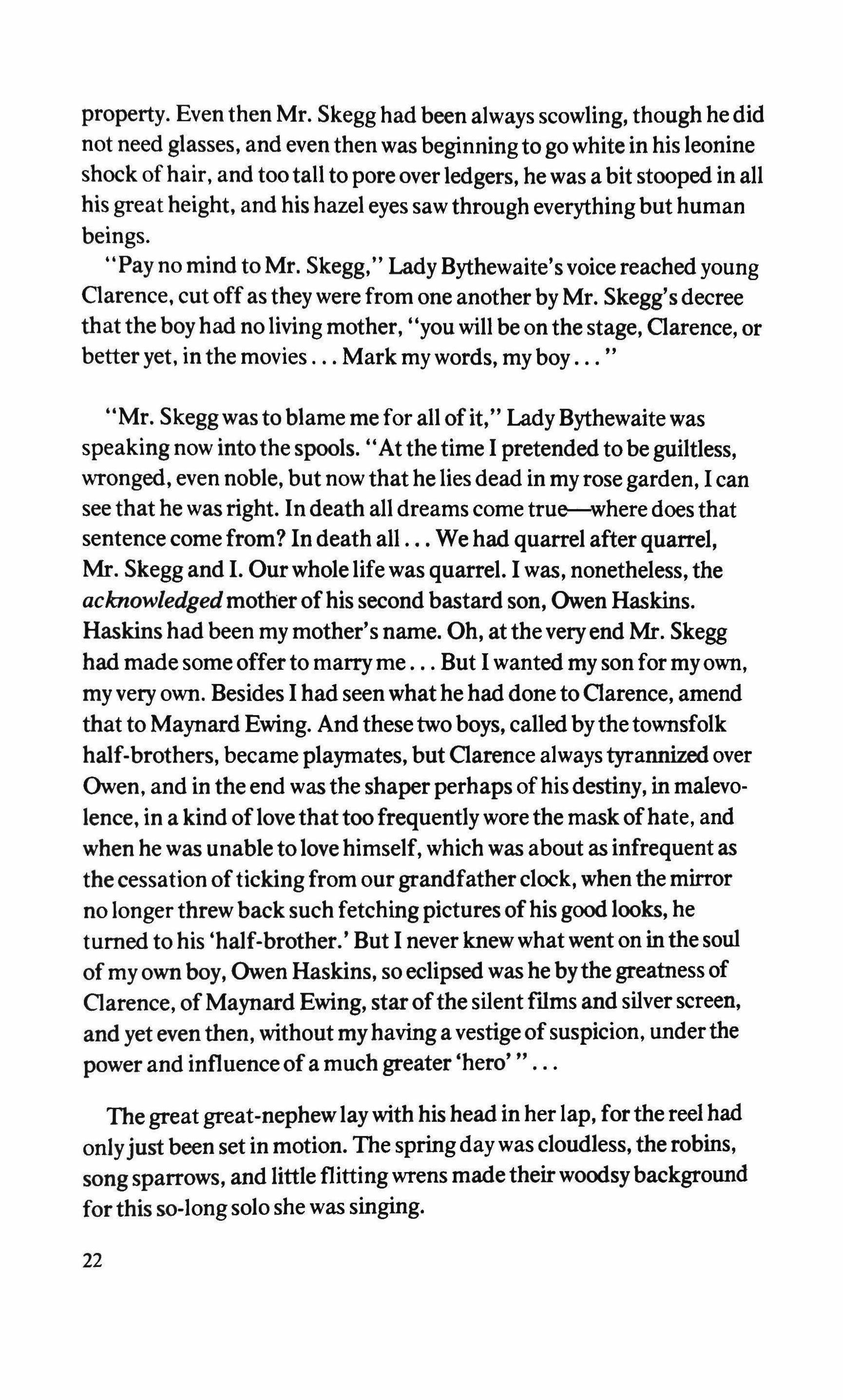
property. Even then Mr. Skegg had been always scowling, though he did not need glasses, and even then was beginning to go white in his leonine shock of hair, and too tall to pore over ledgers, he was a bit stooped in all his great height, and his hazel eyes saw through everythingbut human beings.
"Pay no mind to Mr. Skegg," LadyBythewaite'svoice reached young Clarence, cut off as they were from one another by Mr. Skegg's decree that the boyhad no living mother, "you will be on the stage, Clarence, or better yet, in the movies Mark my words, my boy
Mr. Skegg was to blame me for all ofit," LadyBythewaite was speaking now intothe spools. "At the time I pretended to be guiltless, wronged, even noble, but now that he lies dead in my rose garden, I can see that he was right. In death all dreams come true-where does that sentence come from? In death all We had quarrel after quarrel, Mr. Skegg and I. Ourwholelife was quarrel. I was, nonetheless, the acknowledgedmotherofhis second bastard son, Owen Haskins. Haskins had been my mother's name. Oh, at theveryend Mr. Skegg had made some offer to marry me
But I wanted my son for myown, myvery own. Besides I had seen what he had done to Clarence, amend that to Maynard Ewing. And these two boys, called bythetownsfolk half-brothers, became playmates, but Clarence alwaystyrannized over Owen, and in the end was the shaperperhaps ofhisdestiny, in malevolence, in a kind oflove that too frequently wore the mask ofhate, and when he was unable to love himself, which was about as infrequent as thecessation ofticking from our grandfatherclock, when the mirror no longer threwback such fetchingpictures ofhis good looks, he turned to his 'half-brother.' But I never knewwhat went on inthe soul ofmy own boy, Owen Haskins, so eclipsed was he bythe greatness of Clarence, ofMaynard Ewing, star ofthe silent ftlms and silver screen, and yet even then, without myhaving a vestigeofsuspicion, underthe power and influenceof a much greater 'hero' "
The great great-nephewlaywith his head in her lap, forthe reel had onlyjust been set in motion. The springday was cloudless, the robins, song sparrows, and little flitting wrens madetheirwoodsybackground for this so-longsolo she was singing.
22
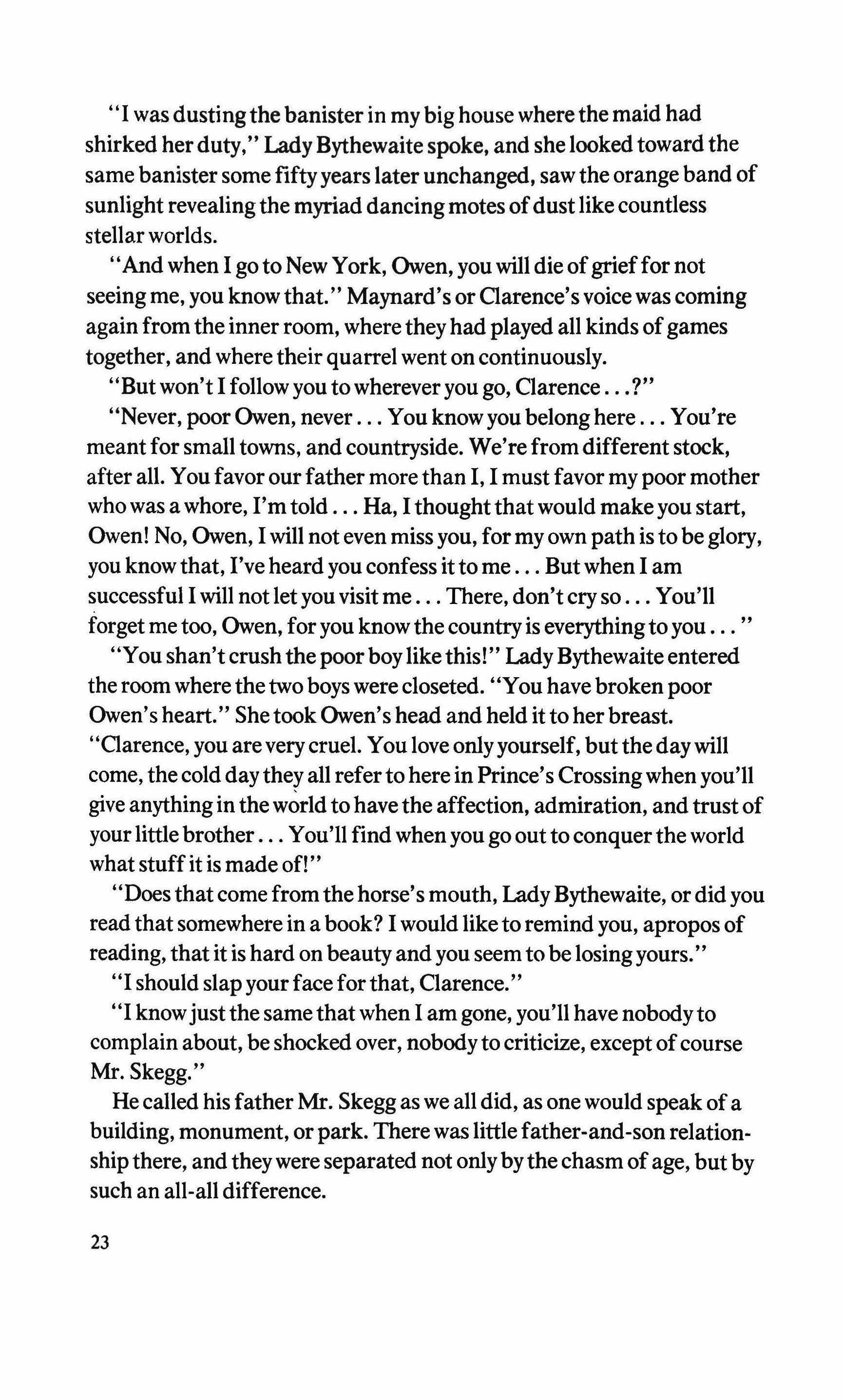
"I was dustingthe banister in my big house where the maid had shirked herduty," LadyBythewaitespoke, and she looked toward the same banister some fiftyyears later unchanged, saw the orange band of sunlightrevealingthe myriaddancing motes ofdust like countless stellarworlds.
"And when I go to New York, Owen, you will die ofgrieffor not seeing me, you know that." Maynard's or Clarence'svoice was coming again from the inner room, where theyhad played all kinds ofgames together, and where their quarrel went on continuously.
"But won't I followyou to whereveryou go, Clarence ?"
"Never, poorOwen, never You know you belong here You're meant for small towns, and countryside. We're from different stock, after all. You favor our father more than I, I must favor my poor mother who was a whore, I'm told Ha, I thoughtthat would make you start, Owen! No, Owen, I will not even miss you, for my own path is to be glory, you know that, I've heard you confess it to me But when I am successful I will not let you visit me There, don't cry so You'll forget me too, Owen, for you knowthe countryis everythingto you
"You shan't crushthepoor boylike this!" LadyBythewaite entered the room where the two boys were closeted. "You have broken poor Owen's heart." Shetook Owen's head and held it to her breast.
"Clarence, you are verycruel. You loveonlyyourself, but the daywill come, the cold daythey all referto here in Prince's Crossingwhenyou'll giveanything in theworld to havethe affection, admiration, and trust of your little brother You'll find when you go out to conquer the world what stuffit is made of!"
"Does that come fromthehorse's mouth, LadyBythewaite, or did you read that somewhere in a book? I would like to remind you, apropos of reading, that it is hard on beauty and you seem to be losingyours."
"I should slap yourface forthat, Clarence."
"I knowjustthe same that when I am gone, you'll have nobodyto complain about, be shocked over, nobody to criticize, except of course Mr. Skegg."
He called his father Mr. Skegg as we all did, as one would speak of a building, monument, or park. There was little father-and-son relationshipthere, and they were separated not onlybythe chasm ofage, but by such an all-all difference.
23

"And when I achieve the great reputation which I know I will," Clarence orated while Owen and LadyBythewaite almost huddled together like persons unexpectedlycaught in a blast offreezingwind, "you'll all remember how you laughed at my ambition, derided my hopes and aspirations
"Oh, stop it, Clarence You know I've encouraged you in all your dreams. Haven't I gone to your father again and again, and interceded? And hasn't he at least listened, hasn't he sometimes softened a little ?"
He bit his lip. You needn't intercede again," Clarence Skeggsaid, "for I'm leaving tonight on the Big Fourexpress
I, Eneas Harmond, felt the weight ofthat name, the Big Four express, as ifit were capable ofbearing someone away from this planet.
"Have you told your father, Clarence?"
"No, Lady Bythewaite, I have not told myfather Do you reckon he'll send the authorities after me, with a little nudgingfrom you?"
"But how will you live, Clarence! Certainly not on your good looks "
He gave LadyBythewaite a look ofroyaldisdain, contempt, indefinite loathing.
Then perhaps to the surpriseofall present, he took his brother in his arms, kissed him, hugged LadyBythewaite, covered her with kisses, and was gone forever from Prince's Crossing as Clarence Skegg. For even when he was to return, when destinyhad tired ofhim as thegreat silent film star, he returned even in that chilled changed aspect not as our Clarence but as Maynard Ewing.
And so he died to us, and poor Owen nearly died. Hero worship is one oflife's miserable calamities, especially when the hero, as is nearly always the case, is steeped in cruelty.
"No, Owen, my precious, you won't get over Clarence leavingyou for a while yet, for I knowwhat a largeplace he occupied inyour heart LadyBythewaitethus comforted her illegitimate son, just as she had in his last lonely insane years comforted "the old maggot," Mr. Skegg. She
24
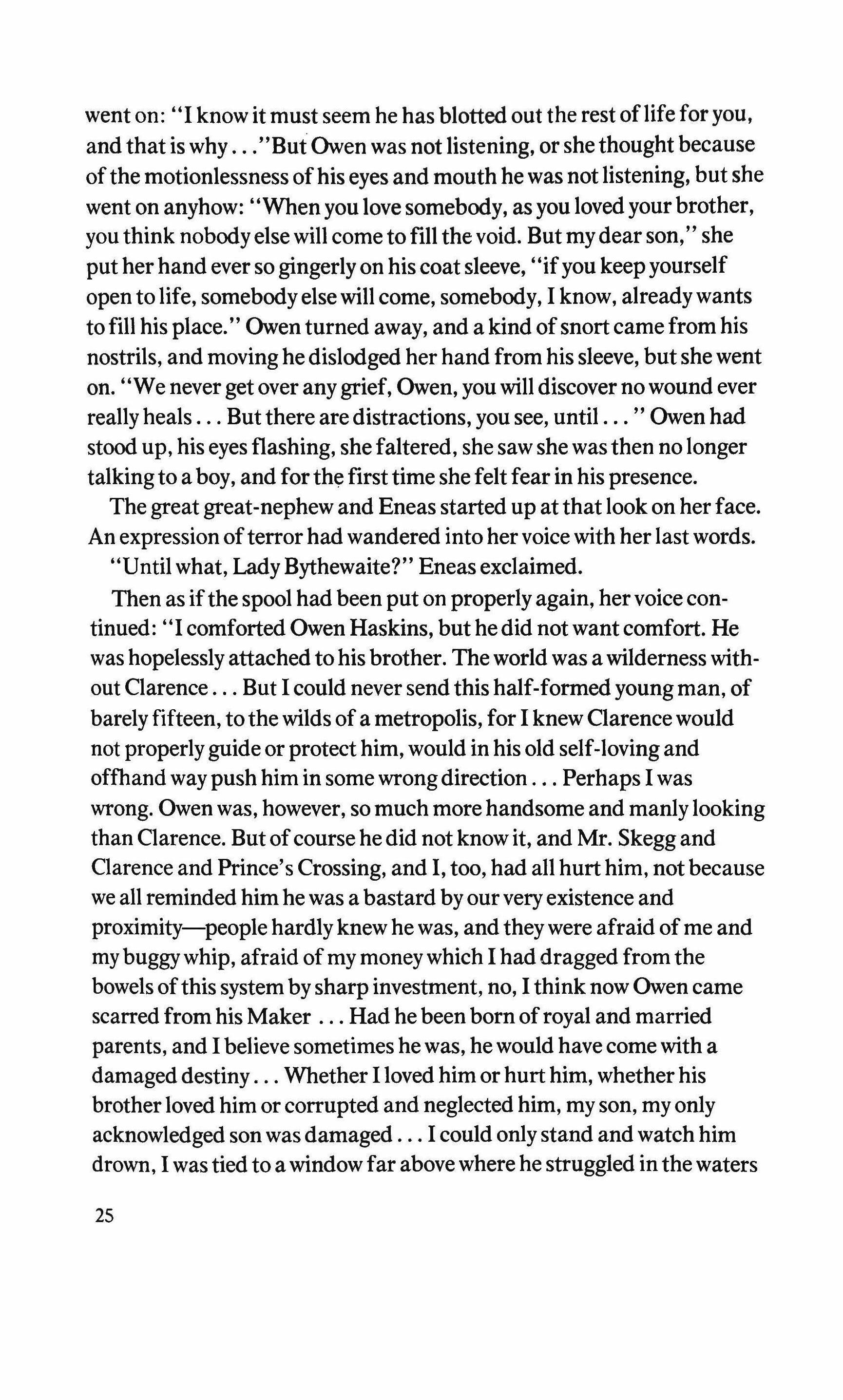
went on: "I know it must seem he has blotted out the rest oflife for you, and that is why "But Owen was not listening, or she thought because ofthe motionlessness ofhis eyes and mouth he was not listening, but she went on anyhow: "When you love somebody, as you loved yourbrother, you think nobodyelse will come to fill the void. But mydear son," she put herhand ever so gingerly on his coat sleeve, "ifyou keepyourself open to life, somebody else will come, somebody, I know, already wants to fill his place." Owen turned away, and a kind of snort came from his nostrils, and moving he dislodged her hand from his sleeve, but she went on. "We never get over any grief, Owen, you will discover no wound ever really heals But there are distractions, you see, until Owen had stood up, his eyes flashing, she faltered, she saw she was then no longer talking to a boy, and forthe firsttime she feltfear in his presence.
The greatgreat-nephew and Eneas started up at that look on her face. An expression ofterror had wandered into hervoice with her last words.
"Until what, LadyBythewaite?" Eneas exclaimed. Then as ifthe spool had been put on properlyagain, hervoice continued: "I comforted Owen Haskins, but he did not want comfort. He was hopelessly attached to his brother. The world was a wilderness without Clarence But I could never send this half-formed young man, of barelyfifteen, tothe wilds of a metropolis, for I knew Clarence would not properlyguide or protecthim, would in his old self-loving and offhand way push him in some wrongdirection Perhaps I was wrong. Owen was, however, so much more handsome and manlylooking than Clarence. But of course he did not know it, and Mr. Skegg and Clarence and Prince's Crossing, and I, too, had all hurt him, not because we all reminded himhe was a bastard by our very existence and proximity-people hardly knew he was, and they were afraid of me and mybuggywhip, afraid ofmy money which I had dragged from the bowels ofthis systembysharp investment, no, I think now Owen came scarred from his Maker Had he been born ofroyal and married parents, and I believe sometimes he was, he would have come with a damageddestiny Whether I loved him or hurt him, whether his brother loved him or corrupted and neglected him, my son, my only acknowledged son was damaged I could only stand and watch him drown, I was tied to a window far above where he struggled in the waters
2S
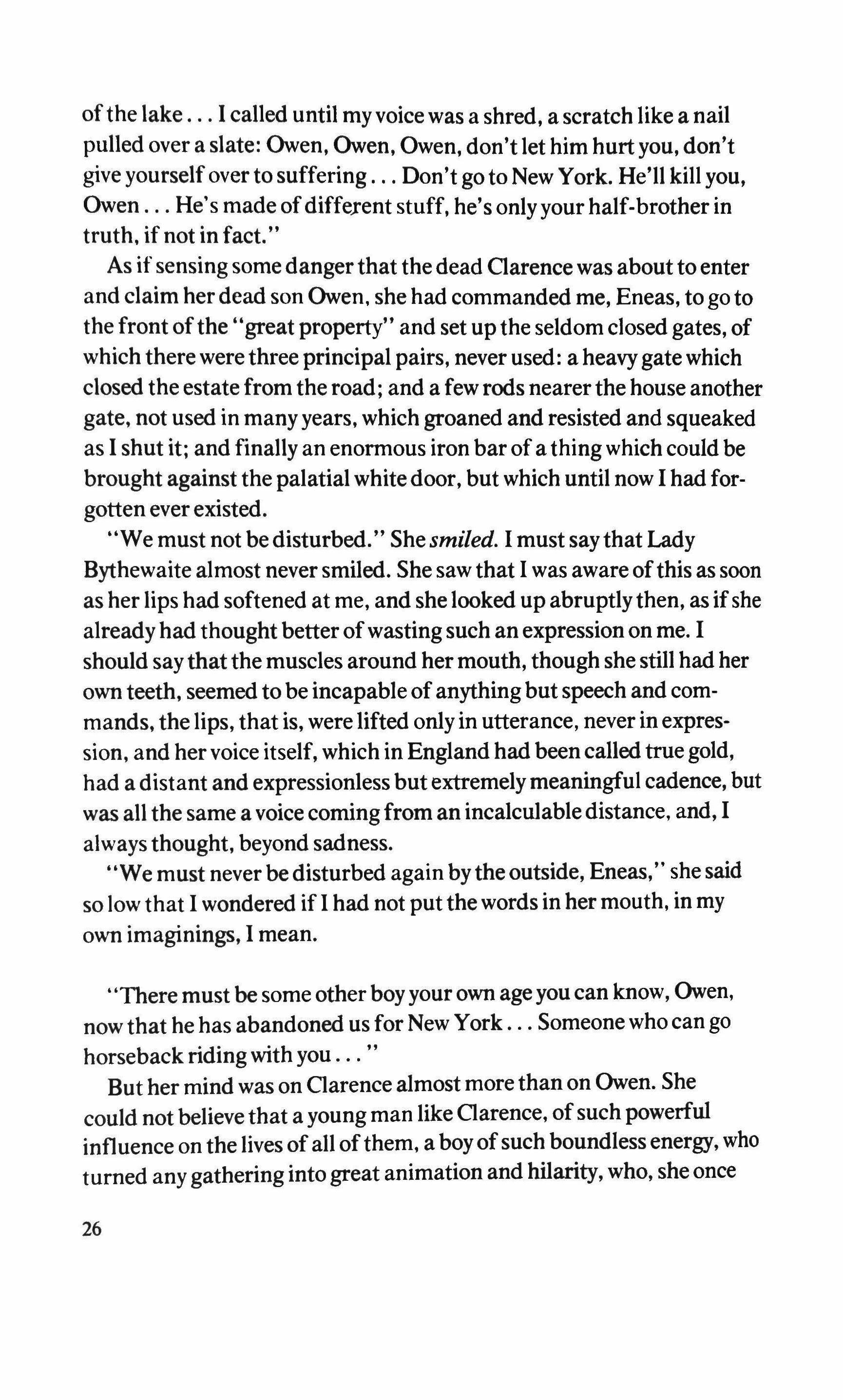
ofthe lake I called until my voice was a shred, a scratch like a nail pulled over a slate: Owen, Owen, Owen, don't let him hurt you, don't giveyourself over to suffering Don't go to New York. He'll kill you, Owen He's made ofdifferent stuff, he's only your half-brother in truth, if not in fact."
As if sensing some dangerthat the dead Clarence was about to enter and claim her dead son Owen. she had commanded me, Eneas, to go to the front ofthe "greatproperty" and set up the seldom closed gates, of which there were three principal pairs, never used: a heavygate which closed the estate from the road; and a fewrods nearer the house another gate, not used in manyyears, which groaned and resisted and squeaked as I shut it; and finally an enormous iron bar of a thing which could be brought against the palatial whitedoor, but which until now I had forgotten ever existed.
"We must not be disturbed." Shesmiled. I must saythat Lady Bythewaite almost never smiled. She saw that I was aware ofthis as soon as her lips had softened at me, and she looked up abruptlythen, as ifshe alreadyhad thought better ofwasting such an expression on me. I should say that the muscles around hermouth, though she still had her own teeth, seemed to be incapable ofanythingbut speech and commands, the lips, that is, were lifted only in utterance, never in expression, and hervoice itself, which in England had been called true gold, had a distant and expressionless but extremelymeaningful cadence, but was all the same a voice comingfrom an incalculabledistance. and, I alwaysthought, beyond sadness.
"We must never be disturbed againbytheoutside, Eneas, she said so low that I wondered if I had not put the words in her mouth, in my own imaginings, I mean
'There must be some other boy your own age you can know, Owen, now that he has abandoned us for New York Someone who can go horseback riding with you
But her mind was on Clarence almost more than on Owen. She could not believe that a young man like Clarence, ofsuch powerful influence on the lives ofall ofthem, a boyofsuch boundless energy, who turned any gathering into great animation and hilarity, who, she once
26
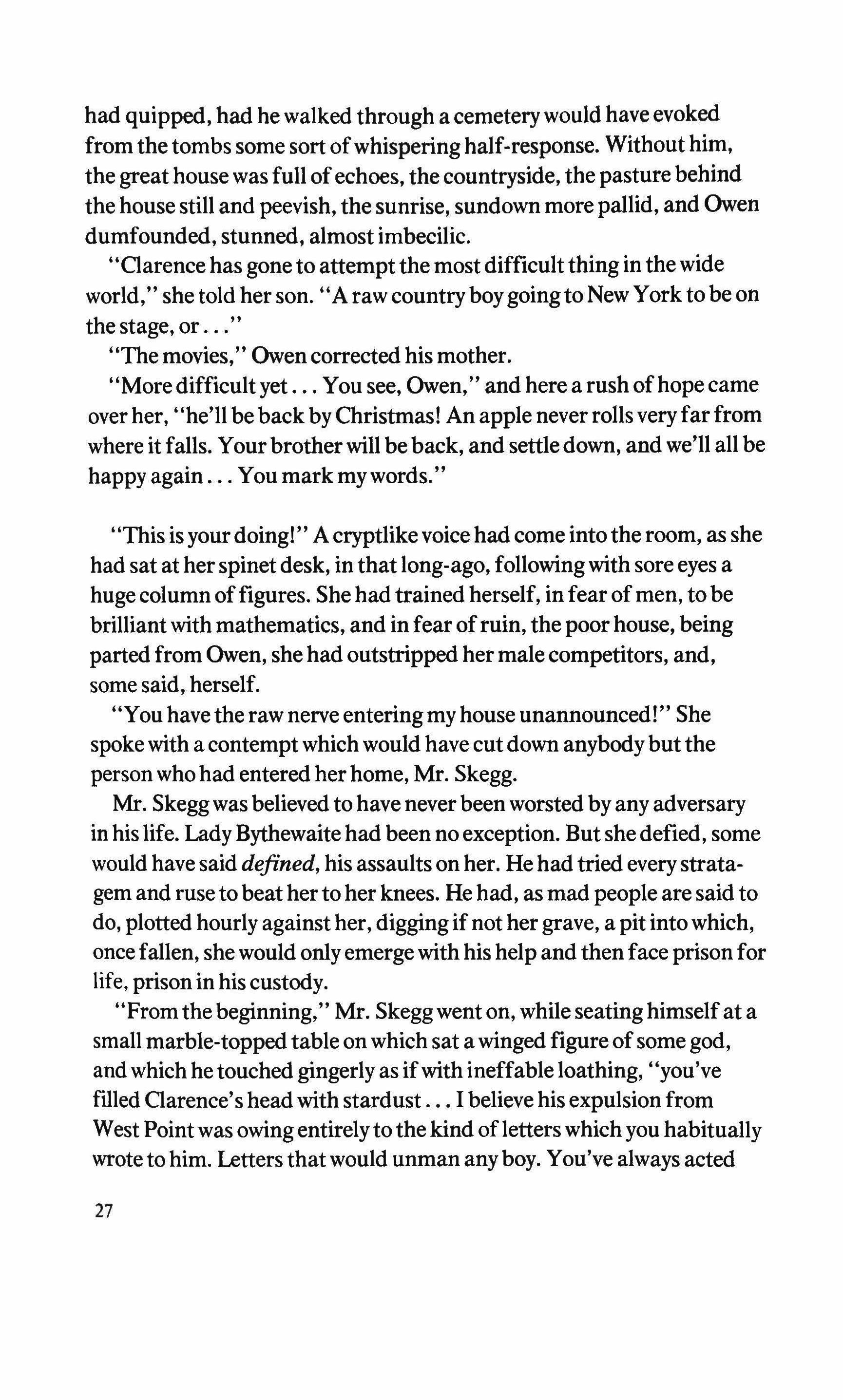
had quipped, had he walked through a cemetery would have evoked from the tombs some sort ofwhisperinghalf-response. Without him, the great house was full ofechoes, the countryside, the pasture behind the house still and peevish, the sunrise, sundown more pallid, and Owen dumfounded, stunned, almost imbecilic.
"Clarence has gone to attempt the most difficultthing in the wide world," she told her son. "A raw countryboygoingto New York to be on the stage, or
"The movies," Owencorrected his mother.
"More difficultyet You see, Owen," and here a rush ofhope came over her, "he'll be back byChristmas! An apple never rolls very farfrom where it falls. Your brother will be back, and settledown, and we'll all be happyagain You mark mywords."
"This isyour doing!" A cryptlike voice had come intothe room, as she had sat at her spinetdesk, in that long-ago, followingwith sore eyes a huge column offigures. She had trained herself, in fear of men, to be brilliant with mathematics, and infear ofruin, the poor house, being parted from Owen, she had outstripped her malecompetitors, and, some said, herself.
"You havethe raw nerve entering my house unannounced!" She spokewith a contempt which would have cut down anybodybut the person whohad entered herhome, Mr. Skegg.
Mr. Skegg was believed to have never been worsted by any adversary in his life. LadyBythewaite had been no exception. But she defied, some would have said defined, his assaults on her. He had tried every stratagem and ruse to beat her to her knees. He had, as mad people are said to do, plotted hourlyagainsther, digging if not her grave, a pit intowhich, once fallen, shewould onlyemerge with his help and then face prison for life, prison in his custody.
"From the beginning," Mr. Skeggwent on, while seatinghimself at a small marble-topped table on which sat a wingedfigure of some god, and which he touched gingerly as ifwith ineffable loathing, "you've filled Clarence's head with stardust I believe his expulsion from West Point was owingentirely to the kind ofletters which you habitually wrote to him. Letters that would unman anyboy. You've always acted
27
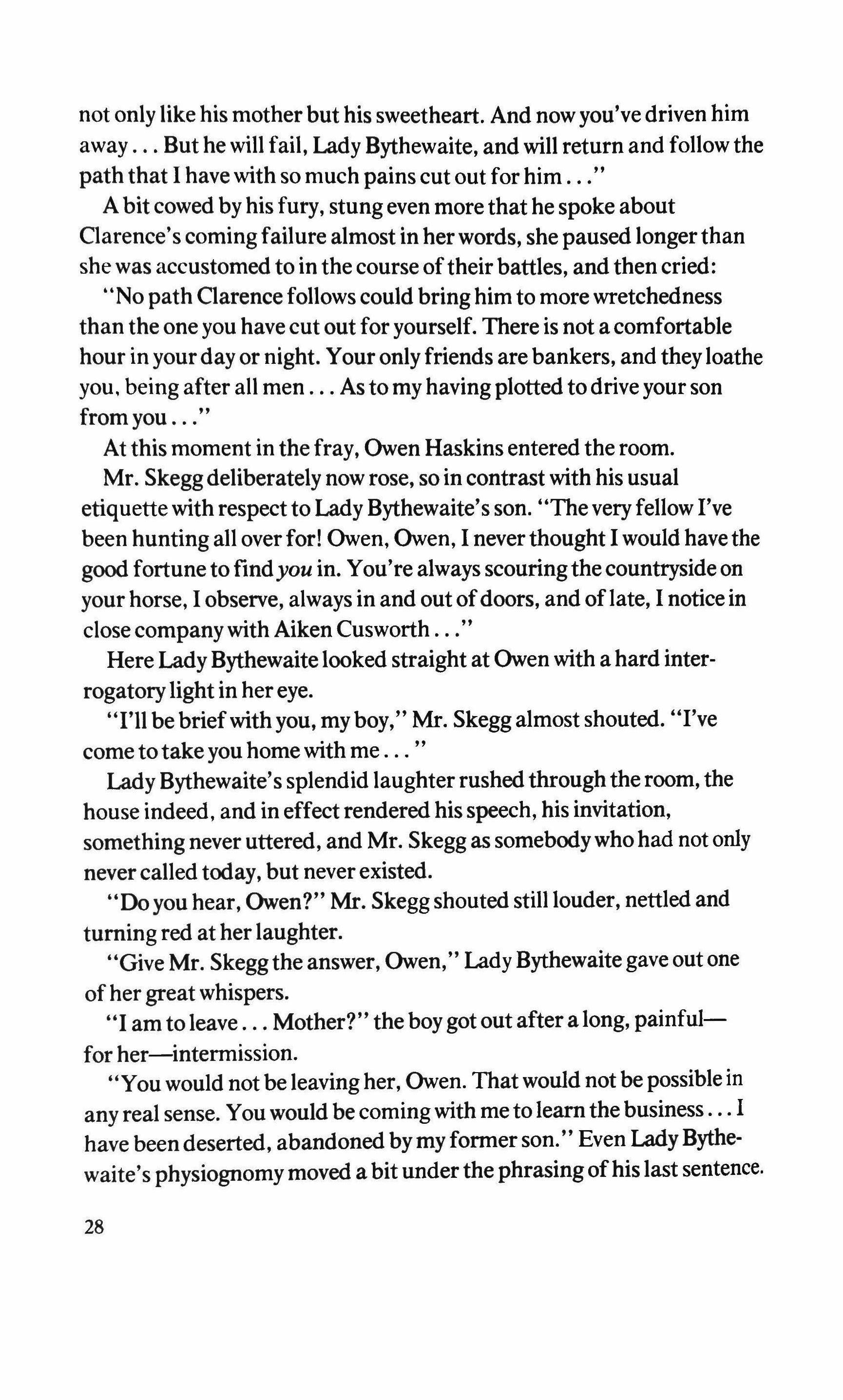
not only like his mother but his sweetheart. And now you've driven him away But he will fail, Lady Bythewaite, and will return and follow the path that I have with so much pains cut out for him "
Abit cowed by his fury, stung even more that he spoke about Clarence's comingfailure almost in herwords, she paused longerthan she was accustomed to in the course oftheirbattles, and then cried:
"No path Clarence follows could bring him to more wretchedness than the one you have cut out for yourself. There is not a comfortable hour in your day or night. Your only friends are bankers, and theyloathe you, being after all men As to my havingplotted to drive your son fromyou
At this moment in the fray, Owen Haskins entered the room.
Mr. Skeggdeliberately now rose, so in contrast with his usual etiquette with respect to Lady Bythewaite's son. "The very fellow I've been hunting all over for! Owen, Owen, I never thought I would havethe good fortune to findyou in. You're alwaysscouringthecountryside on your horse, I observe, always in and out ofdoors, and oflate, I notice in close companywith Aiken Cusworth
Here LadyBythewaite looked straight at Owen with a hard interrogatorylight in hereye.
"I'll be briefwithyou, my boy," Mr. Skegg almost shouted. "I've come totake you home with me
Lady Bythewaite'ssplendid laughter rushed throughthe room, the house indeed, and in effect rendered his speech, his invitation, something never uttered, and Mr. Skegg as somebodywho had not only never called today, but never existed.
"00 you hear, Owen?" Mr. Skegg shouted still louder, nettled and turning red at her laughter.
"Give Mr. Skeggthe answer, Owen," LadyBythewaite gave out one of her greatwhispers.
"I am to leave Mother?" the boygot out after a long, painfulfor her-intermission.
"You would not be leavingher, Owen. That would not be possible in any real sense. You would be coming with me to learn the business I have been deserted, abandoned bymy former son." Even LadyBythewaite's physiognomymoved a bit under the phrasingofhis last sentence.
28
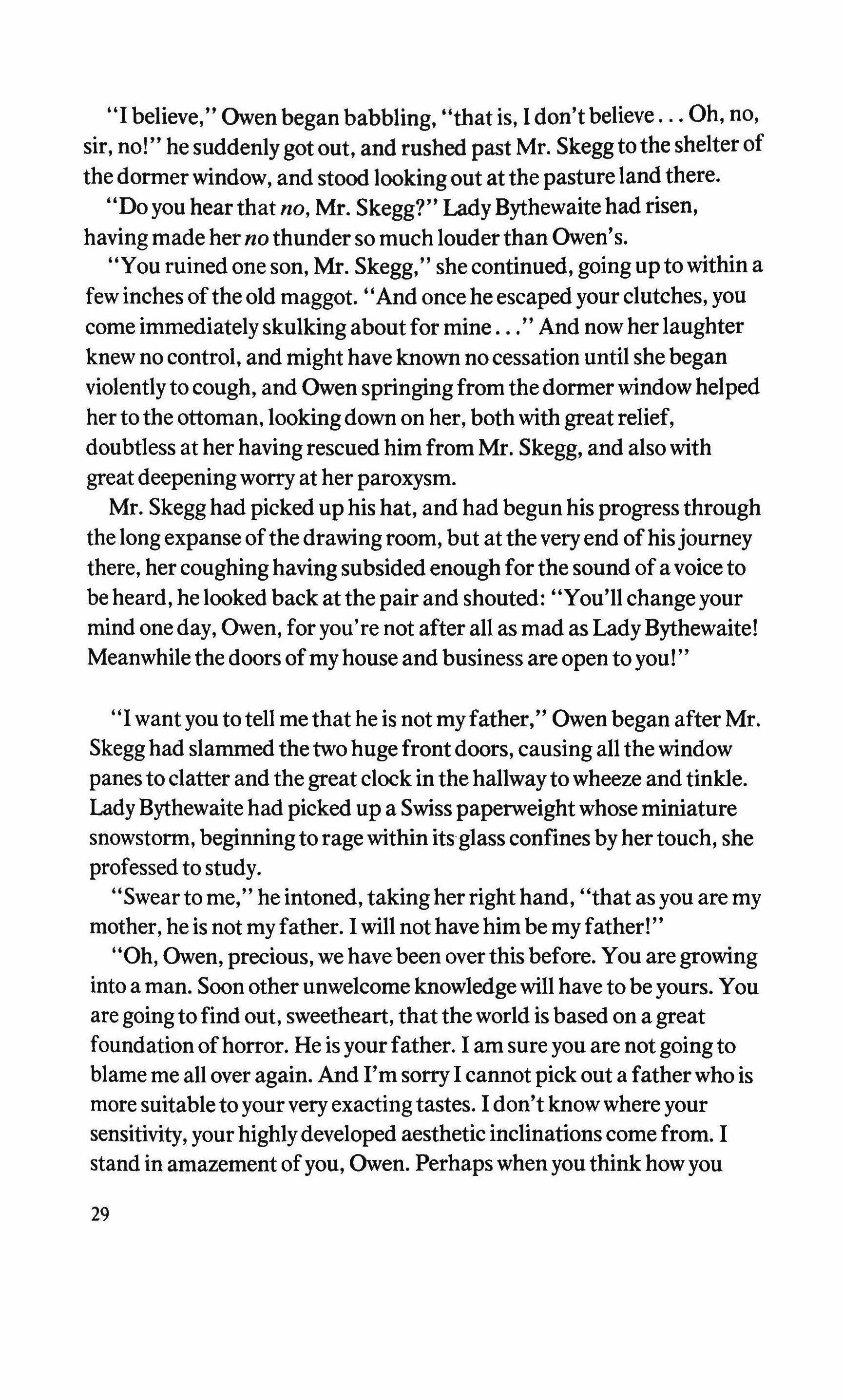
"I believe," Owen beganbabbling, "that is, I don't believe Oh, no, sir, no!" he suddenlygot out, and rushed past Mr. Skegg to the shelter of the dormerwindow, and stood looking out at the pasture land there.
"Do you hearthat no, Mr. Skegg?" LadyBythewaite had risen, having made her no thunder so much louderthan Owen's.
"You ruined one son, Mr. Skegg," she continued, going up to within a few inches ofthe old maggot. "And once he escaped yourclutches, you come immediatelyskulking about for mine " And now her laughter knew no control, and might have known no cessation until she began violently to cough, and Owen springing from thedormer windowhelped her to the ottoman, lookingdown on her, both with greatrelief, doubtless at her having rescued him from Mr. Skegg, and also with great deepeningworry at her paroxysm.
Mr. Skegg had picked up his hat, and had begun his progress through the long expanse ofthe drawing room, but at the very end ofhisjourney there, her coughinghaving subsided enough forthe sound of a voice to be heard, he looked back at the pair and shouted: "You'll change your mind one day, Owen, foryou're not after all as mad as LadyBythewaite! Meanwhilethe doors ofmy house and business are open to you!"
"I want you to tell me that he is not myfather," Owen began after Mr. Skegg had slammed the two huge front doors, causing all the window panes to clatter and the great clock in the hallwayto wheeze and tinkle. LadyBythewaite had picked up a Swiss paperweight whose miniature snowstorm, beginning to rage within its glass confines by hertouch, she professed to study.
"Swear to me," he intoned, takingher righthand, "that as you are my mother, he is not my father. I will not have him be my father!"
"Oh, Owen, precious, we have been over this before. You are growing into a man. Soon other unwelcome knowledge will have to be yours. You are goingto find out, sweetheart, that the world is based on a great foundation ofhorror. He is yourfather. I am sure you are not goingto blame me all over again. And I'm sorry I cannot pick out a fatherwho is more suitable to your very exacting tastes. I don't knowwhere your sensitivity, your highlydeveloped aesthetic inclinations come from. I stand in amazement ofyou, Owen. Perhaps when you think how you
29
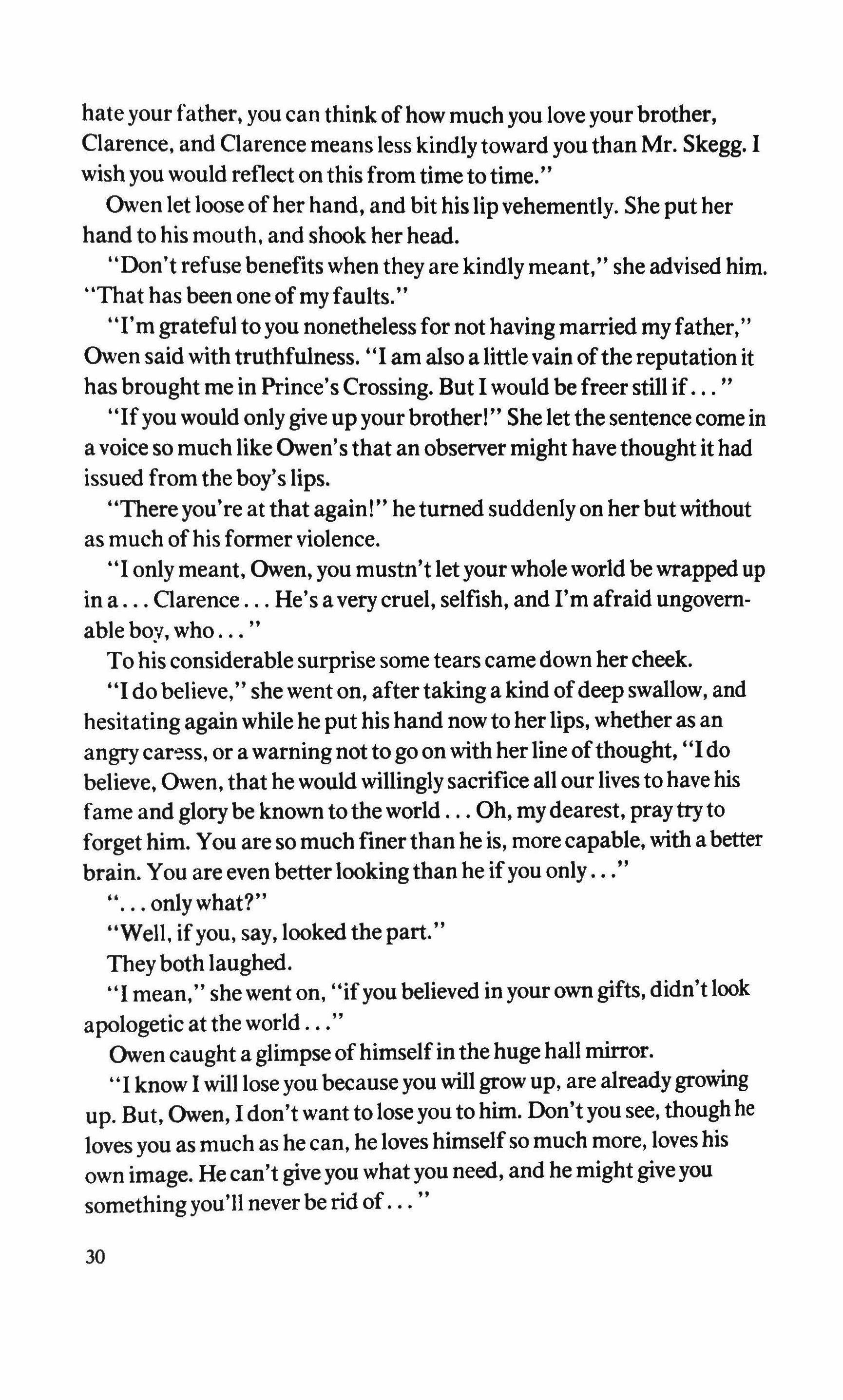
hate your father, you can think ofhow much you loveyour brother, Clarence. and Clarence means less kindly toward you than Mr. Skegg. I wish you would reflect on this from time to time."
Owen let loose ofher hand, and bit his lipvehemently. She put her hand to his mouth, and shook her head.
"Don't refuse benefits when they are kindlymeant," she advised him. "That has been one ofmy faults."
"I'm grateful to you nonetheless for not having married myfather," Owen said with truthfulness. "I am also a little vain ofthe reputation it has brought me in Prince's Crossing. But I would be freerstill if
"Ifyou would onlygive up your brother!" She let the sentence come in a voice so much like Owen's that an observer might havethought it had issued from the boy'slips.
"Thereyou're at that again!" heturned suddenly on herbutwithout as much ofhis former violence.
"I only meant, Owen, you mustn't let your whole world bewrapped up in a Oarence He's a very cruel, selfish, and I'm afraid ungovernable boy, who
To his considerable surprise some tears came down hercheek.
"I do believe," she went on, aftertaking a kind ofdeep swallow, and hesitatingagain while he put his hand now to herlips, whether as an angry car-ess, or a warning not to go on with her line ofthought, "I do believe, Owen, that he would willingly sacrifice all our lives to have his fame and glorybe known to theworld Oh, mydearest, praytryto forget him. You are so much finerthan he is, more capable, with a better brain. You are even better lookingthan he ifyou only onlywhat?"
"Well, ifyou, say, looked the part."
Theyboth laughed I mean," she went on, "ifyou believed in your own gifts, didn't look apologetic at the world
Owen caught a glimpse ofhimselfinthe huge hall mirror I know I will lose you becauseyou will grow up, are alreadygrowing up. But, Owen, I don't want to loseyou to him. Don'tyou see, though he loves you as much as he can, he loves himself so much more, loves his own image. He can't give you what you need, and he mightgiveyou somethingyou'll never be rid of "
30
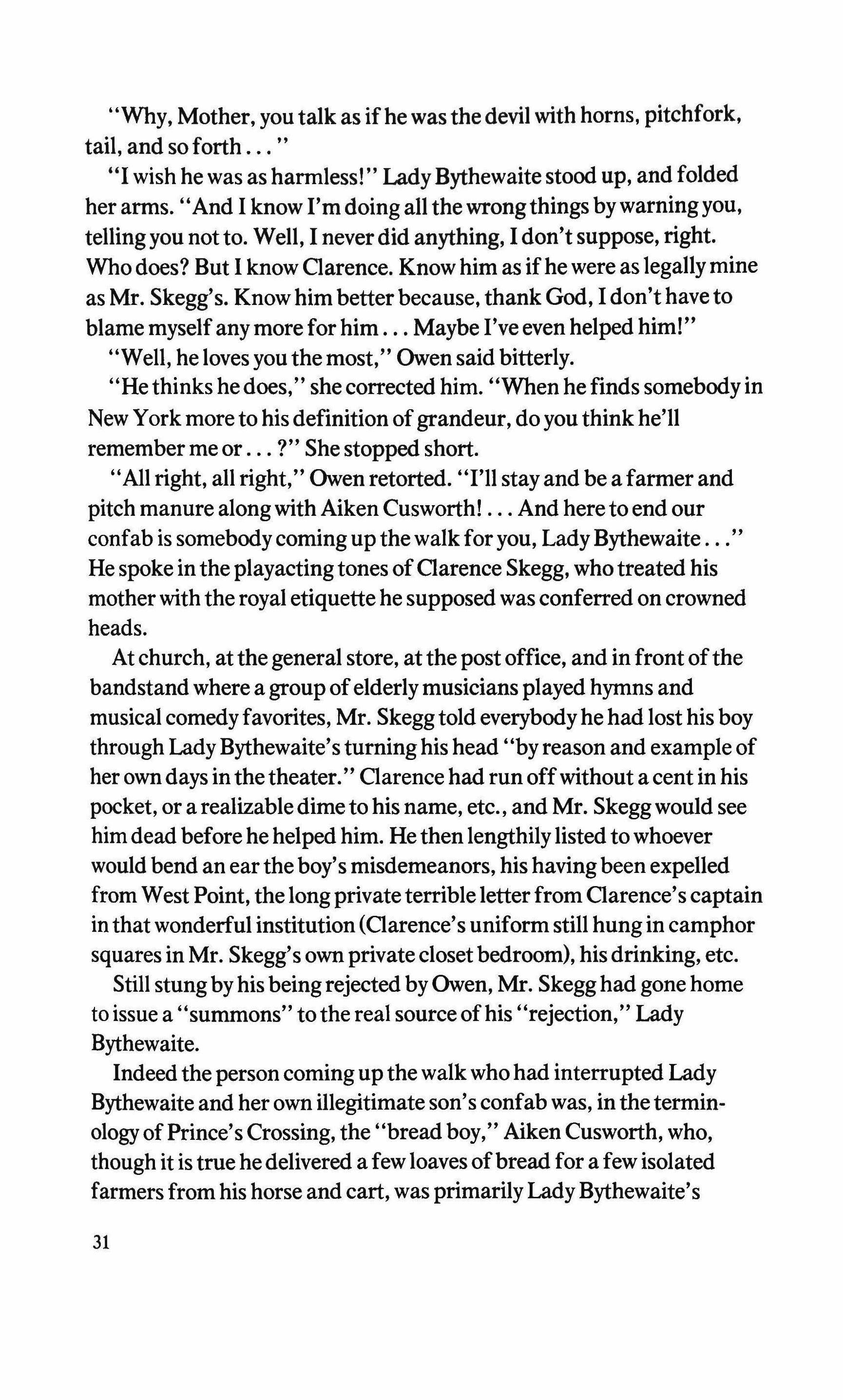
"Why, Mother, you talk as ifhe was the devil with horns, pitchfork, tail, and so forth ;"
"I wish he was as harmless!" LadyBythewaite stood up, and folded her arms. "And I know I'm doing all thewrongthingsbywarningyou, tellingyou not to. Well, I never did anything, I don't suppose, right. Who does? But I know Clarence. Know him as ifhe were as legallymine as Mr. Skegg's. Knowhim better because, thank God, I don't have to blame myself any more for him Maybe I've even helped him!"
"Well, he loves you the most," Owen said bitterly.
"He thinks hedoes," she corrected him. "When he finds somebody in New York more to his definition ofgrandeur, do you think he'll remember me or ?" She stopped short.
"All right, all right," Owen retorted. "I'll stay and be a farmer and pitch manure alongwith Aiken Cusworth! And here to end our confab is somebodycoming up thewalkforyou, LadyBythewaite " He spoke in the playacting tones ofClarence Skegg, who treated his mother with the royaletiquette he supposed was conferred on crowned heads.
At church, at the general store, at the postoffice, and in front ofthe bandstand where a group ofelderly musicians played hymns and musical comedyfavorites, Mr. Skeggtold everybodyhe had lost his boy through LadyBythewaite'sturninghis head "by reason and example of her own days in thetheater." Clarence had run offwithout a cent in his pocket, or a realizable dime to his name, etc., and Mr. Skeggwould see him dead before he helped him. He then lengthily listed to whoever would bend an ear theboy'smisdemeanors, his having been expelled from West Point, the longprivateterrible letterfrom Clarence's captain inthatwonderful institution (Clarence's uniform still hung in camphor squares in Mr. Skegg's own private closet bedroom), his drinking, etc.
Still stungby his beingrejectedbyOwen, Mr. Skegg had gone home to issue a "summons" to the real source ofhis "rejection," Lady Bythewaite.
Indeed the person comingup the walk who had interrupted Lady Bythewaite and her own illegitimate son's confab was, in theterminologyof Prince's Crossing, the "bread boy," Aiken Cusworth, who, though it is true hedelivered a fewloaves ofbread for a few isolated farmers from his horse and cart, was primarilyLadyBythewaite's
31
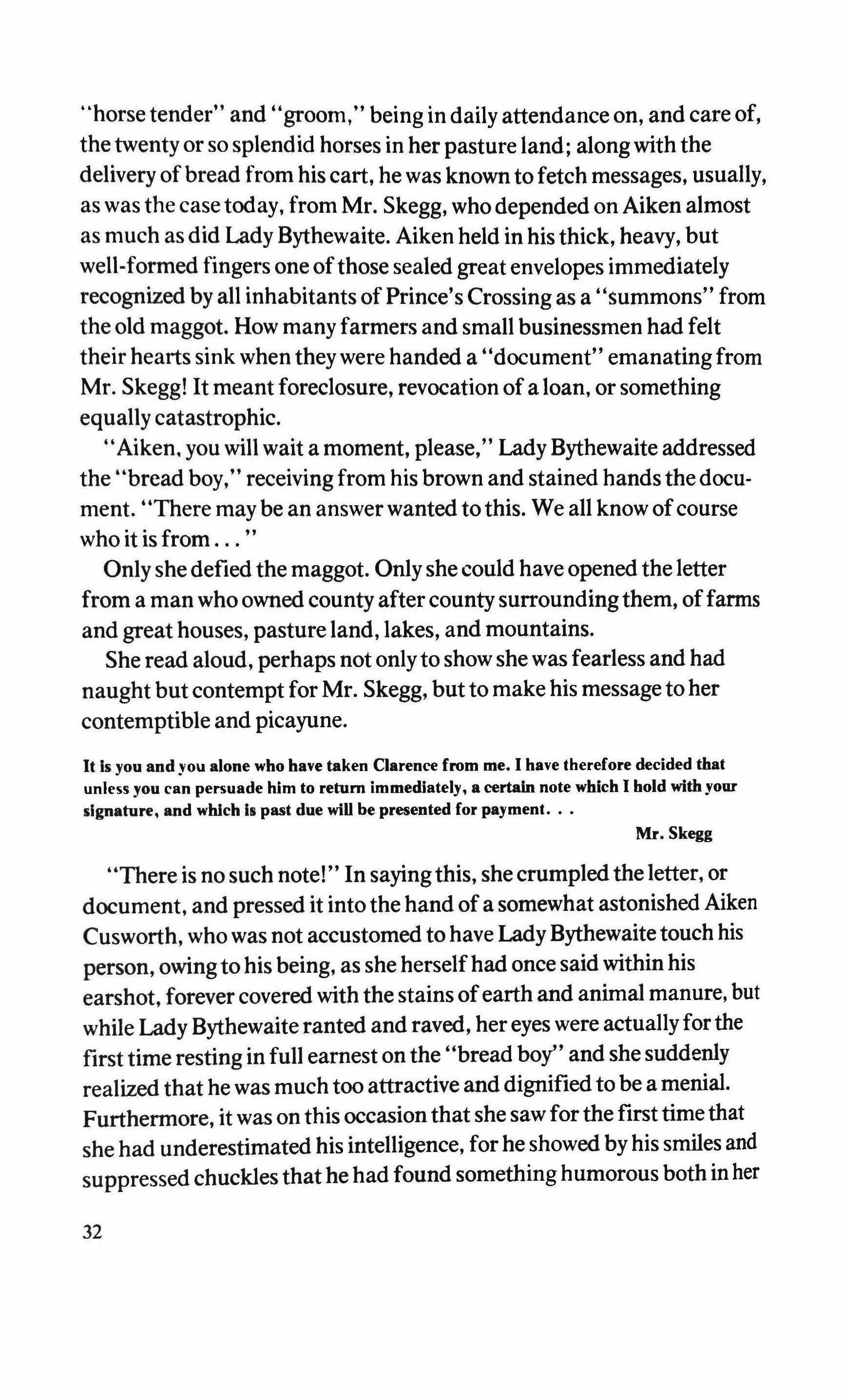
"horse tender" and" groom," being in daily attendance on, and care of, the twenty or so splendid horses in her pasture land; alongwith the delivery ofbread from his cart, he was known to fetch messages, usually, as was the case today, from Mr. Skegg, whodepended on Aiken almost as much as did Lady Bythewaite. Aiken held in his thick, heavy, but well-formed fingers one ofthose sealed greatenvelopes immediately recognized by all inhabitants of Prince's Crossing as a "summons" from the old maggot. How many farmers and small businessmen had felt their hearts sink when they were handed a "document" emanating from Mr. Skegg! It meant foreclosure, revocation of a loan, or something equallycatastrophic Aiken. you will wait a moment, please," LadyBythewaite addressed the "bread boy," receiving from his brown and stained hands thedocument. "There may be an answer wanted to this. We all knowof course who it is from
Only she defied the maggot. Onlyshe could have opened the letter from a man who owned county aftercountysurroundingthem, offarms and greathouses, pasture land, lakes, and mountains.
She read aloud, perhaps not onlyto showshe was fearless and had naught butcontempt for Mr. Skegg, but to make his message to her contemptible and picayune.
It Is you and you alone who have taken aarence from me. I have therefore decided that unless you can persuade him to return immediately, a certain note which I bold with your sIgnature, and which is past due wiD be presented for payment
Mr.Skegg
"There is no such note!" In sayingthis, she crumpled the letter, or document, and pressed it intothe hand of a somewhat astonished Aiken Cusworth, who was not accustomed to have LadyBythewaitetouch his person, owingto his being, as she herselfhad once said within his earshot, forever covered with the stains ofearth and animal manure, but while Lady Bythewaite ranted and raved, her eyes were actually forthe first time resting in full earnest on the "bread boy" and she suddenly realized that he was much too attractive and dignified to be a menial. Furthermore, it was on this occasion that she saw for the firsttime that she had underestimated his intelligence, forhe showed by his smiles and suppressed chuckles that he had found something humorous both in her
32
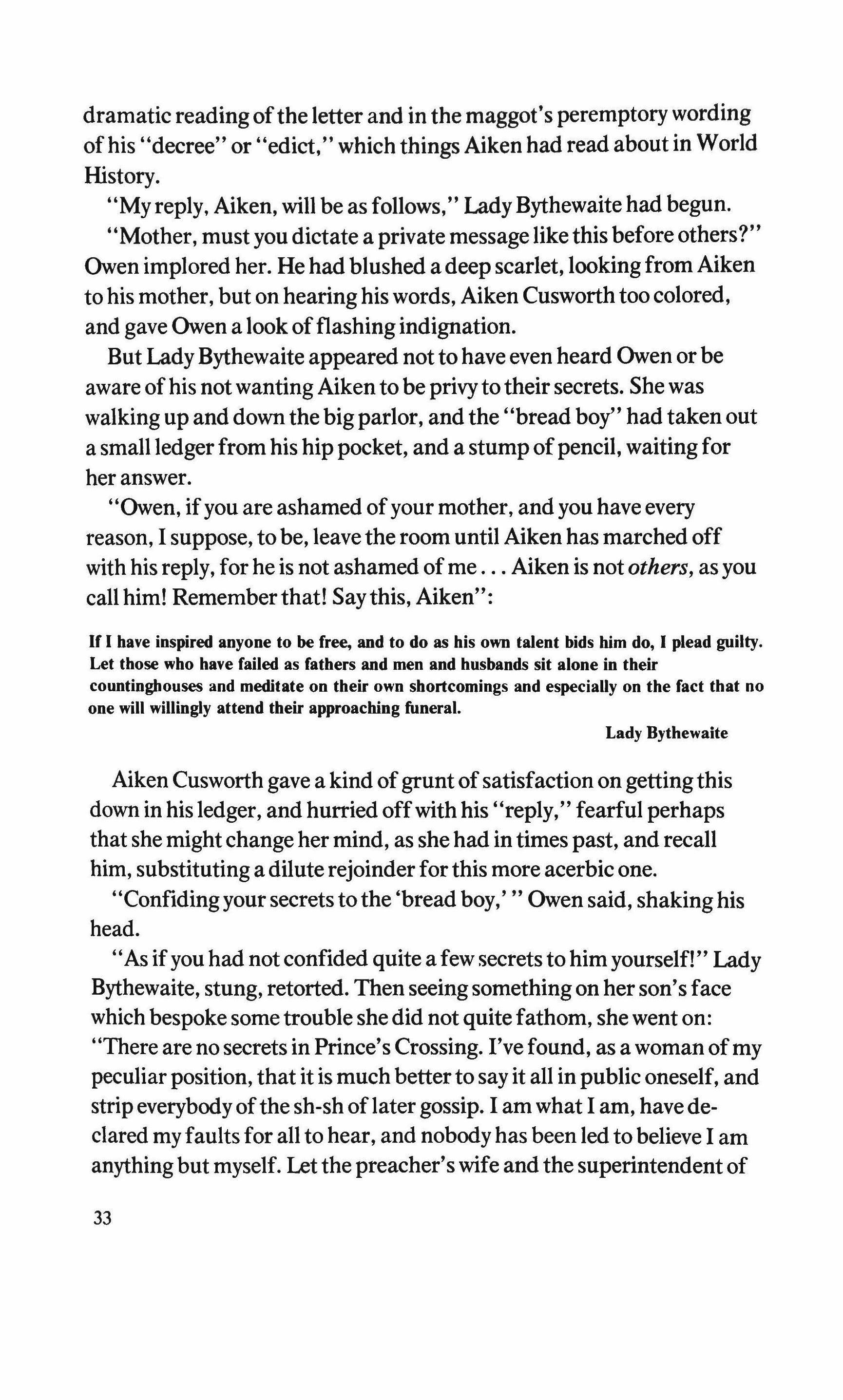
dramatic readingofthe letter and in the maggot's peremptory wording ofhis "decree" or "edict," which things Aiken had read about in World History.
"Myreply, Aiken, will be as follows," LadyBythewaite had begun. "Mother, must you dictate a private message like this before others?" Owen implored her. He had blushed a deep scarlet, looking from Aiken to his mother, but on hearing his words, Aiken Cusworth too colored, and gave Owen a look offlashingindignation.
But LadyBythewaiteappeared not to have even heard Owen or be aware ofhis not wanting Aiken to be privyto their secrets. She was walking up and down the bigparlor, and the "bread boy" had taken out a small ledgerfrom his hippocket, and a stump ofpencil, waiting for her answer.
"Owen, ifyou are ashamed ofyour mother, and you have every reason, I suppose, to be, leave the room until Aiken has marched off with his reply, for he is not ashamed of me Aiken is not others, as you call him! Remember that! Saythis, Aiken":
If I have inspired anyone to be free, and to do as his own talent bids him do, I plead guilty. Let those who have failed as fathers and men and husbands sit alone in their countinghouses and meditate on their own shortcomings and especiaUy on the fact that no one will willingly attend their approaching funeral.
Lady Bythewaite
Aiken Cusworth gave a kind ofgruntofsatisfaction on gettingthis down in his ledger, and hurried offwith his "reply," fearful perhaps that she mightchange her mind, as she had in times past, and recall him, substituting a dilute rejoinder forthis more acerbic one.
"Confiding your secrets to the 'bread boy,' " Owen said, shakinghis head.
"As ifyou had not confided quite a few secrets to himyourself!" Lady Bythewaite, stung, retorted. Then seeingsomething on her son's face which bespoke some trouble she did not quitefathom, she went on:
"There are no secrets in Prince's Crossing. I've found, as a woman ofmy peculiarposition, that it is much better to say it all in public oneself, and stripeverybody ofthe sh-sh oflater gossip. I am what I am, havedeclared my faults for all to hear, and nobody has been led to believe I am anythingbut myself. Let the preacher's wife and the superintendent of
33
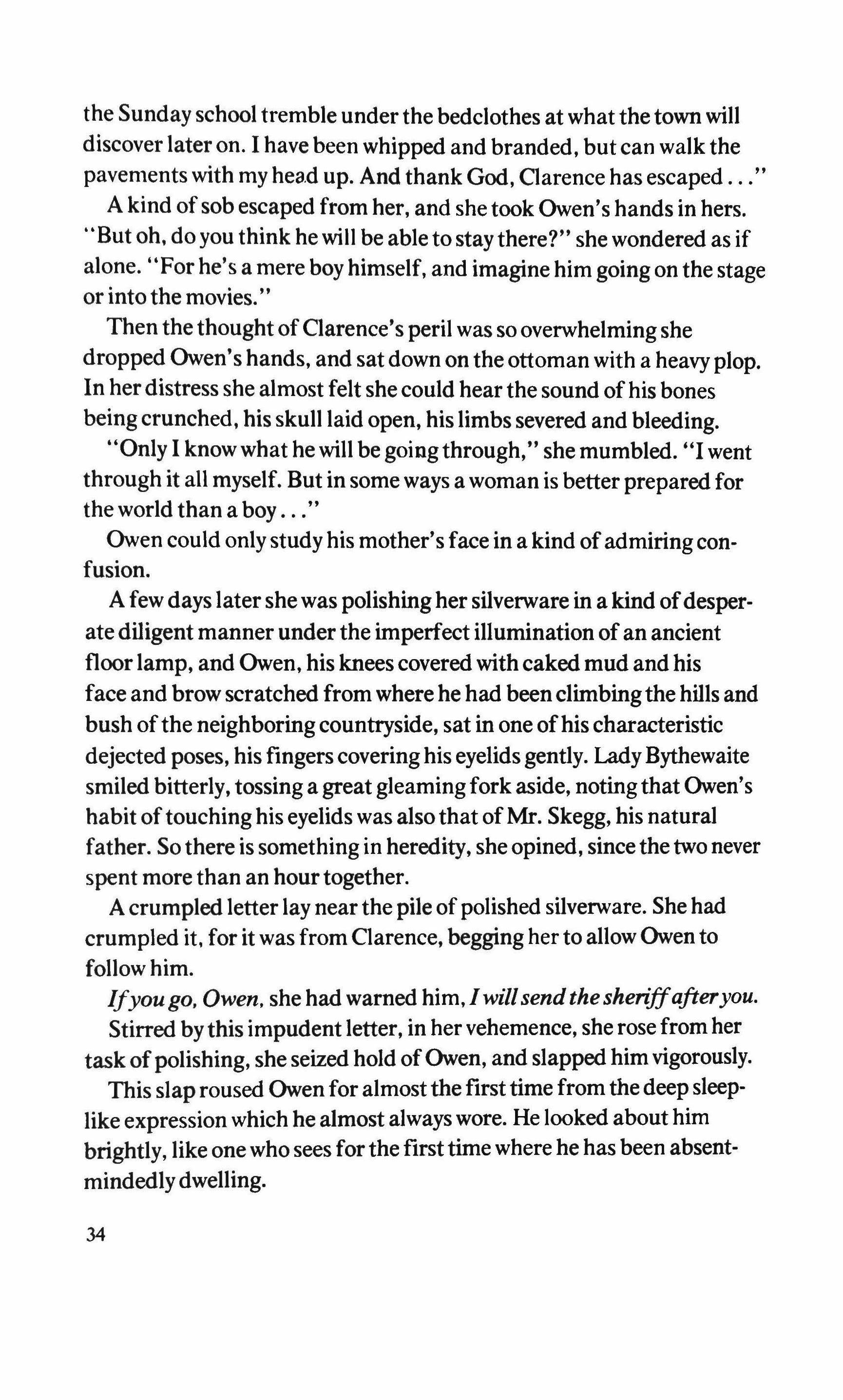
the Sunday school tremble under the bedclothes at what the town will discover later on. I have been whipped and branded, but can walk the pavements with my head up. And thank God, Clarence has escaped
A kind ofsob escaped from her, and she took Owen's hands in hers
But oh, do you think he will be able to stay there?" she wondered as if alone. "For he's a mere boy himself, and imagine him going on the stage or into the movies."
Then the thought ofClarence's peril was so overwhelmingshe dropped Owen's hands, and sat down on the ottoman with a heavyplop. In herdistress she almost felt she could hear the sound ofhis bones beingcrunched, his skull laid open, his limbs severed and bleeding.
"Only I know what he will be goingthrough," she mumbled. "I went through it all myself. But in some ways a woman is better prepared for the world than a boy
Owen could onlystudy his mother's face in a kind ofadmiring confusion.
A few days later she was polishingher silverware in a kind ofdesperate diligent manner under the imperfect illumination of an ancient floor lamp, and Owen, his knees covered with caked mud and his face and brow scratched from where he had beenclimbingthe hills and bush ofthe neighboringcountryside, sat in one ofhis characteristic dejected poses, his fingerscoveringhis eyelidsgently. LadyBythewaite smiled bitterly,tossing a great gleamingfork aside, notingthat Owen's habit oftouchinghis eyelids was alsothat ofMr. Skegg, his natural father. So there is something in heredity, she opined, since the two never spent more than an hour together.
A crumpled letter lay near the pile ofpolished silverware. She had crumpled it, for it was from Clarence, begging her to allow Owen to follow him.
Ifyougo, Owen. she had warned him, Iwillsendthesheriffafteryou. Stirred bythis impudentletter, in her vehemence, she rose from her task ofpolishing, she seized hold ofOwen, and slapped himvigorously. This slap roused Owen for almost the firsttime from the deepsleeplike expression which he almost always wore. He looked about him brightly, like one who sees forthe first time where he has been absentmindedlydwelling.
34
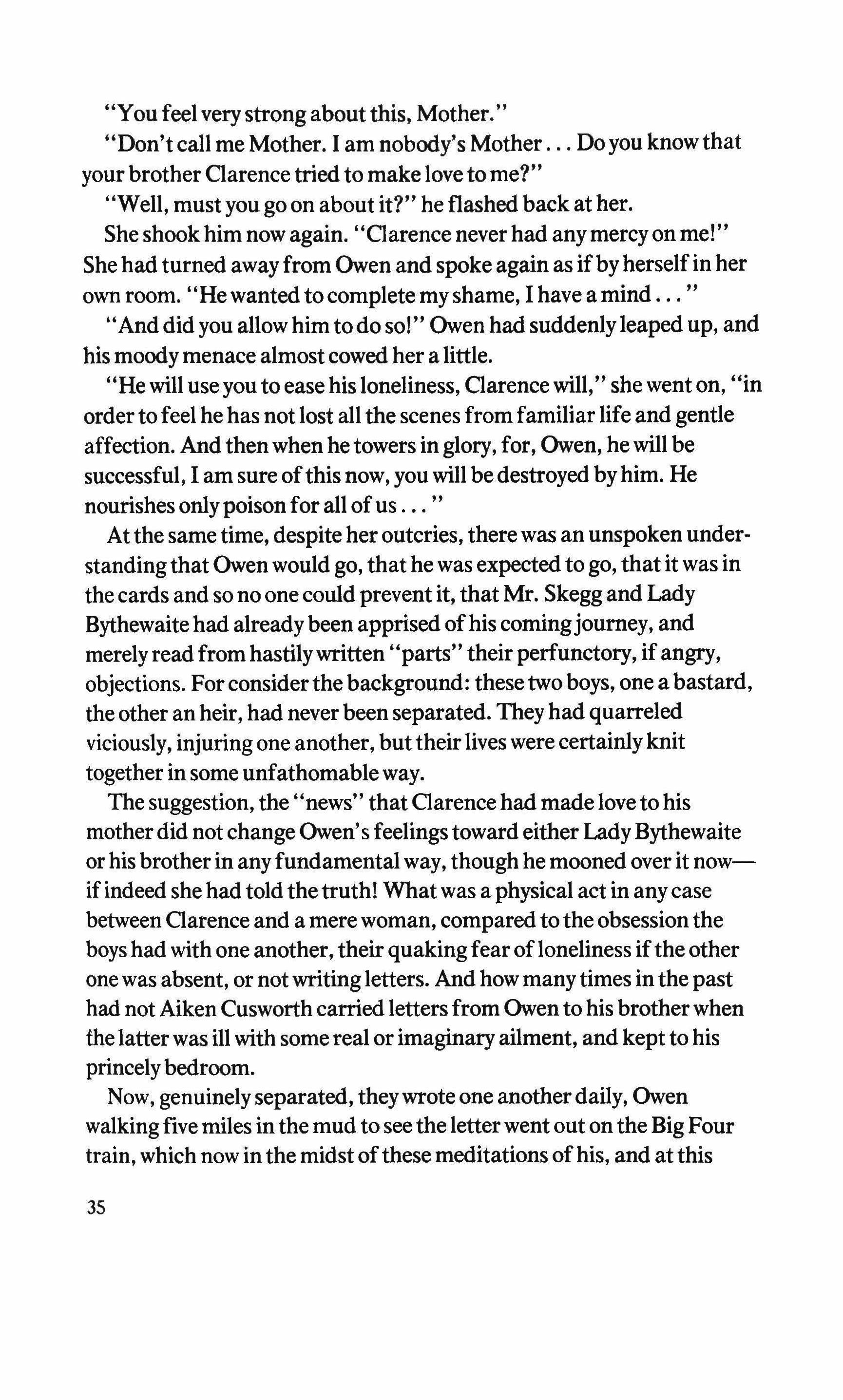
"You feel verystrong aboutthis, Mother."
"Don't call me Mother. I am nobody's Mother Doyou know that your brother Clarence tried to make love to me?"
"Well, must you go on about it?" he flashed back at her. She shook him now again. "Clarence never had any mercy on me!" She had turned awayfrom Owen and spokeagain as ifbyherselfin her own room. "He wanted to complete my shame, I have a mind
"And did you allow him to do sol" Owen had suddenlyleaped up, and his moody menace almost cowed her a little.
"He will use you to ease his loneliness, Clarence will," she went on, "in order to feel he has not lost all the scenes from familiar life and gentle affection. Andthenwhenhe towers in glory, for, Owen, hewill be successful, I am sure ofthis now, you will be destroyed byhim. He nourishes onlypoison for all of us
At the same time, despite her outcries, there was an unspoken understanding that Owen would go, that he was expected to go, that it was in the cards and so no one could prevent it, that Mr. Skegg and Lady Bythewaite had already been apprised ofhis comingjoumey, and merely read from hastily written "parts" their perfunctory, if angry, objections. For considerthe background: these two boys, one a bastard, the other an heir, had never been separated. Theyhad quarreled viciously, injuring one another, but their lives were certainlyknit together in some unfathomable way.
The suggestion, the "news" that Clarence had made love to his mother did not change Owen's feelings toward either LadyBythewaite or his brother in any fundamental way, though he mooned over it nowif indeed she had told the truth! What was a physical act in any case between Clarence and a mere woman, compared to the obsessionthe boys had with one another, theirquakingfearofloneliness iftheother one was absent, or not writing letters. And how many times inthe past had not Aiken Cusworth carried letters from Owen to his brotherwhen the latter was ill with some real or imaginaryailment, and kept to his princelybedroom.
Now, genuinelyseparated, they wrote one anotherdaily, Owen walking five miles in the mud to see the letter went out on the Big Four train, which now in the midst ofthese meditations ofhis, and at this
3S

precise moment, let out its iron wail ofgriefand crazy, beckoning invitation.
And so Lady Bythewaitebegan going over all his clothes, having his shoes resoled and reheeled, mending his shirts, and purchased him some new cravats from a mail-order house.
"The City is terrible." she would go on, speaking to him from under the floor lamp on the succeedingevenings. "London is a horror, and New York will surelybe worse. Everyone goes wrong, Owen, when he is away from his roots You have everythinghere," she spoke with furious patriotism and added, almost whispering, the conclusion, "except of course a father
"Well, let him go and be damned!" she cried to herselflater in her bedroom. She saw him alreadydead, in his coffin. Her hand trembled, her eye could not see the needle she held in her shakingfingers. She must let Owen go, or expire herself.
"Clarence'swhole hankering after the theater has one and only one source: you!" Mr. Skegghad begun his "process" againstLadyBythewaite, a few weeks after Clarence's departure, in his cathedral-huge study, where he had summoned her peremptorily. Actually, she had ignored this summons, and had gone to his mammoth studysolely on a mission ofher own: to intercedewith Mr. Skeggto prevent Owen from followingafter his brother, and she had come only to find that Mr. Skegg had decided on his own to send theyounger boyafter his actorbrother in order to''fetch the runaway home"!
"You'd throw one person into the quicksand head first to bring up another who is settling toward the bottom!" she opined, forgettingin her anger the bad picture she was paintingofClarence's plight. "And why, may I ask, do you have this sudden impetus to send Owen after Clarence, when it is I, according to you, who am so subject to brainstorms? You must be in receipt ofspecial news You know something I don't know!" she finished, nettled that this should be so, for she had always prided herself on knowingeverything about her sons. while Mr. Skegg remained in some outer sphere, where only incidental intelligence was accorded him. And from as far back as she could remember, she had always wanted Mr. Skeggto know nothingabout the two boys until she was prepared to let such information "go."
36
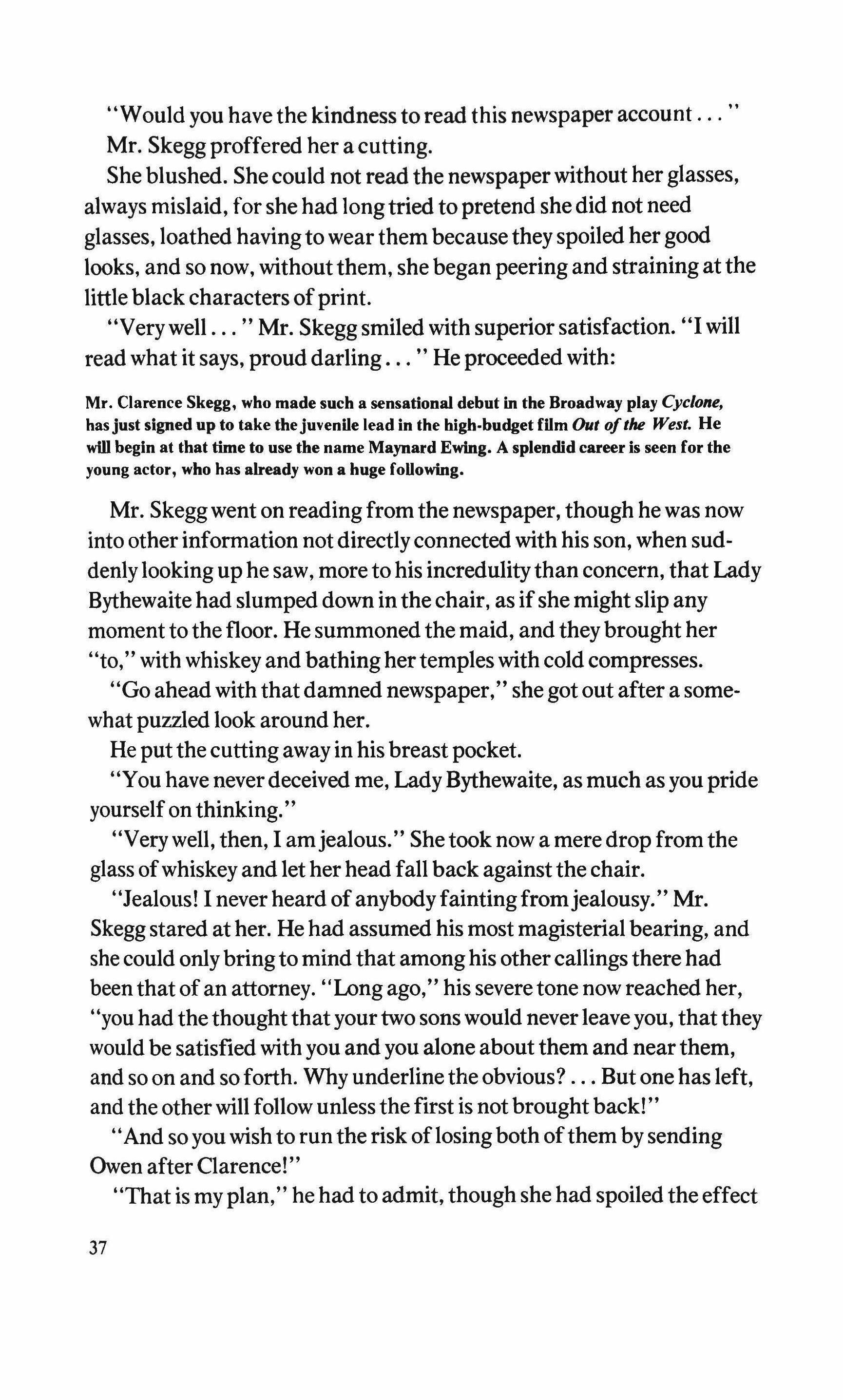
"Would you have the kindness to read this newspaper account
Mr. Skeggproffered her a cutting.
She blushed. She could not read the newspaperwithout her glasses, always mislaid, for she had longtried to pretend she did not need glasses, loathed havingto wear them because theyspoiled hergood looks, and so now, withoutthem, she beganpeering and straining at the little black characters ofprint.
"Verywell Mr. Skegg smiled with superior satisfaction. "I will read what it says, prouddarling " He proceeded with:
Mr. Clarence Skegg, wbo made sucb a sensational debut in tbe Broadway play Cyclone, has just signed up to take thejuvenUe lead in the hlgh-budget fflm Out ofthe West. He wUI begin at that time to use the name Maynard Ewing. A splendid career is seen for the young actor, who has already won a huge foUowlng.
Mr. Skeggwent on reading from the newspaper, though he was now into other information not directly connected with his son, when suddenlylooking up he saw, more to his incredulity than concern, that Lady Bythewaite had slumped down inthe chair, as ifshe mightslip any moment to the floor. He summoned the maid, and theybrought her "to," with whiskey and bathing hertemples with cold compresses.
"Go ahead with that damned newspaper," she got out after a somewhat puzzled look around her.
He putthe cutting away in his breast pocket.
"You have never deceived me, LadyBythewaite, as much as you pride yourself on thinking."
"Verywell, then, I am jealous." She took now a mere drop from the glass ofwhiskey and let her head fall back against the chair.
"Jealous! I never heard of anybodyfainting fromjealousy. Mr. Skegg stared at her. He had assumed his most magisterialbearing, and she could onlybringto mind that among his other callings there had been that of an attorney. "Longago," his severe tone now reached her, "you had thethought that your two sons would never leave you, that they would be satisfied with you and you alone about them and near them, and so on and so forth. Why underline the obvious? But one has left, and the other will follow unless the first is not brought back!"
And so you wish to run the risk oflosingboth ofthem bysending Owen after Clarence!"
"That is my plan," he had to admit, though she had spoiled the effect
37
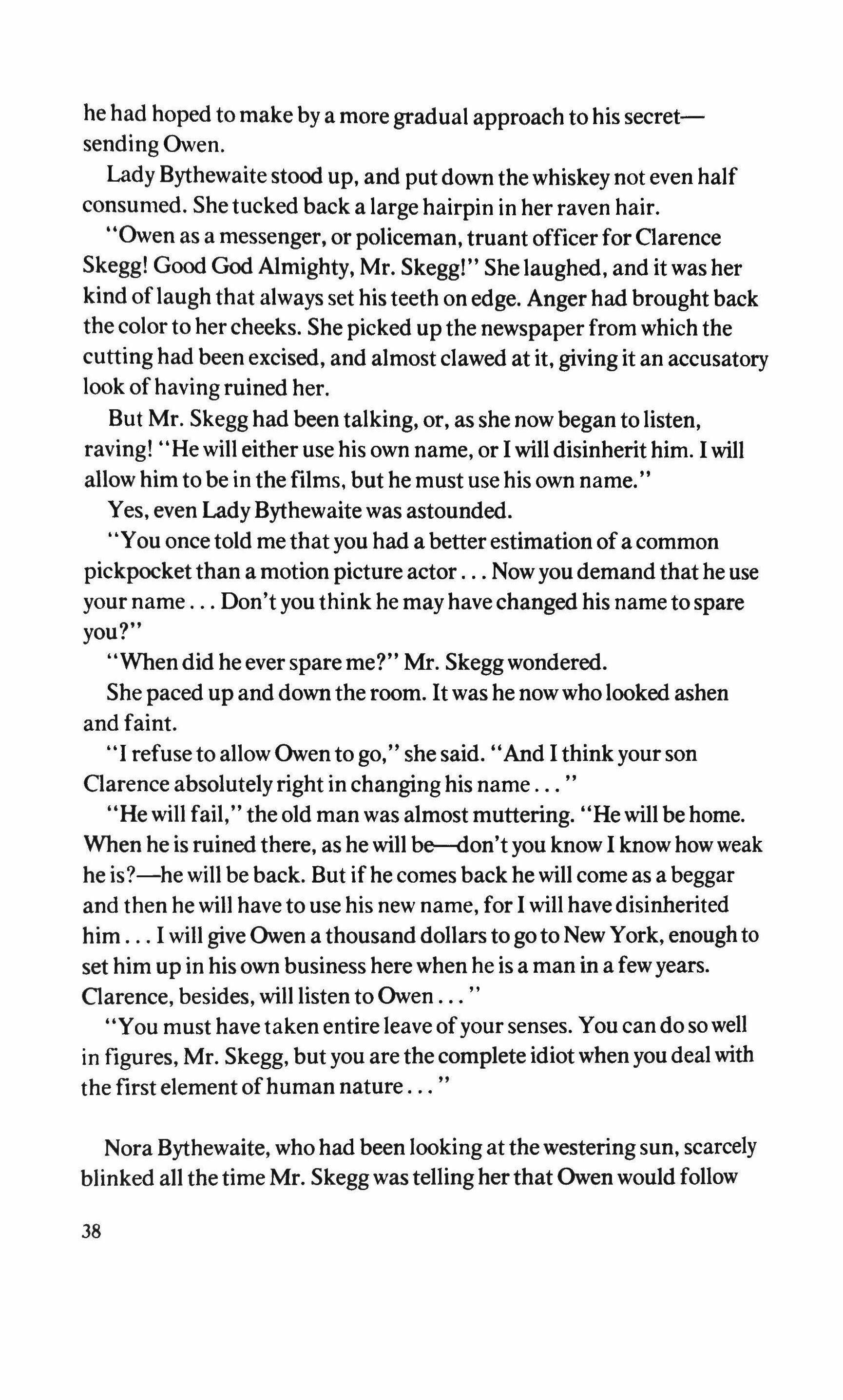
he had hoped to make by a more gradual approach to his secretsending Owen.
LadyBythewaite stood up, and put down the whiskey not even half consumed. She tucked back a largehairpin in her raven hair.
"Owen as a messenger, or policeman, truant officer for Clarence Skegg! Good God Almighty, Mr. Skeggl" She laughed, and it was her kind oflaugh that always set his teeth on edge. Anger had brought back the color to her cheeks. She picked up the newspaper from which the cutting had been excised, and almost clawed at it, giving it an accusatory look ofhaving ruined her.
But Mr. Skegg had been talking, or, as she now began to listen, raving! "He will either use his own name, or I will disinherit him. I will allow him to be in the films, but he must use his own name."
Yes, even LadyBythewaite was astounded.
"You once told me that you had a better estimation of a common pickpocketthan a motion picture actor Nowyou demand that he use your name Don't you think he may have changed his name to spare you?"
"When did he ever spare me?" Mr. Skeggwondered. She paced up and down the room. It was he now who looked ashen and faint
.• I refuse to allow Owen to go," she said. "And I think your son Clarence absolutelyright in changing his name
"He will fail," the old man was almost muttering. "He will be home. When he is ruined there, as he will be-e-don't you know I know howweak he is?-he will be back. But ifhecomes back he will come as a beggar and then he will have to use his new name, for I will have disinherited him I will give Owen a thousand dollars to go to New York, enough to set him up in his own business here when he is a man in a fewyears.
Clarence, besides, will listen to Owen
"You must have taken entire leave ofyour senses. You can do so well in figures, Mr. Skegg, but you are the complete idiot when you deal with the first element ofhuman nature "
Nora Bythewaite, who had been looking at thewestering sun, scarcely blinked all the time Mr. Skegg was tellingherthat Owen would follow
38
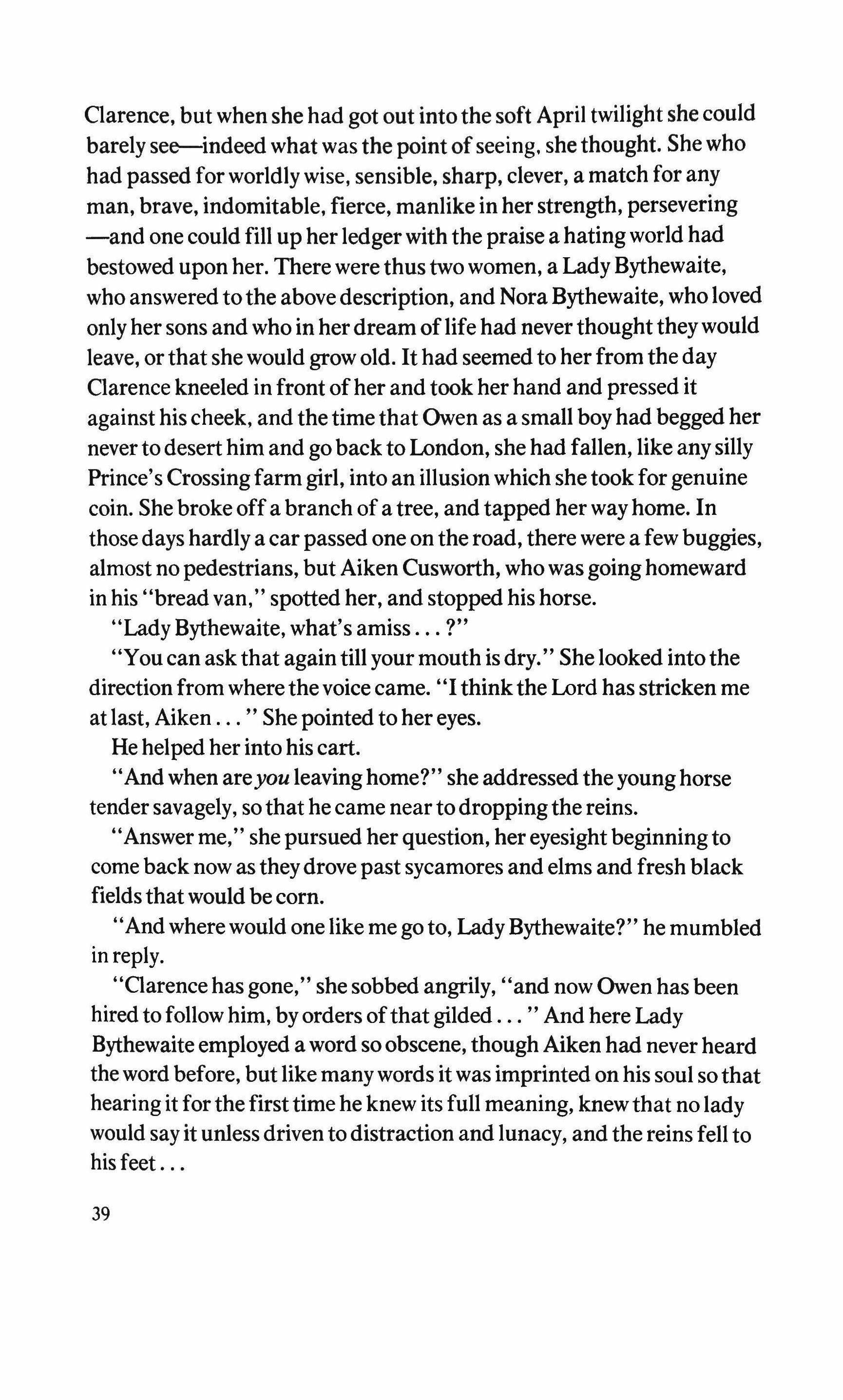
Oarence, but when she had got out intothe soft April twilight she could barely see=indeed what was the point ofseeing, she thought. She who had passed forworldly wise, sensible, sharp, clever, a match for any man, brave, indomitable, fierce, manlike in her strength, persevering -and one could fill up her ledgerwith the praise a hating world had bestowed upon her. There were thus two women, a LadyBythewaite, who answered to the above description, and Nora Bythewaite, who loved only her sons and who in her dream oflife had never thoughttheywould leave, or that she would grow old. It had seemed to her from the day Oarence kneeled in front ofher and took her hand and pressed it against his cheek, and thetime that Owen as a small boyhad begged her never to desert him and go back to London, she had fallen, like any silly Prince's Crossingfarm girl, into an illusion which she took for genuine coin. She broke off a branch of a tree, and tapped her way home. In thosedayshardly a car passed one on the road, there were a few buggies, almost no pedestrians, but Aiken Cusworth, who was goinghomeward in his "bread van," spotted her, and stopped his horse.
"LadyBythewaite, what's amiss ?"
'You can ask that again till your mouth is dry." She looked intothe direction from wherethe voice came. "I thinkthe Lord has stricken me at last, Aiken She pointed to her eyes. He helped her into his cart.
"And when areyou leavinghome?" she addressed the younghorse tender savagely, so that he came near to droppingthe reins.
"Answer me," she pursued her question, her eyesightbeginning to come back now as theydrove past sycamores and elms and fresh black fieldsthatwould be corn.
"And wherewould one like me go to, LadyBythewaite?" he mumbled in reply.
"Oarence has gone," she sobbed angrily, "and now Owen has been hired to follow him, by orders ofthat gilded And here Lady Bythewaiteemployed a word so obscene, though Aiken had never heard the word before, but like many words it was imprinted on his soul so that hearingit forthe firsttime he knew its full meaning, knewthat no lady would say it unless driven to distraction and lunacy, and the reins fell to his feet
39
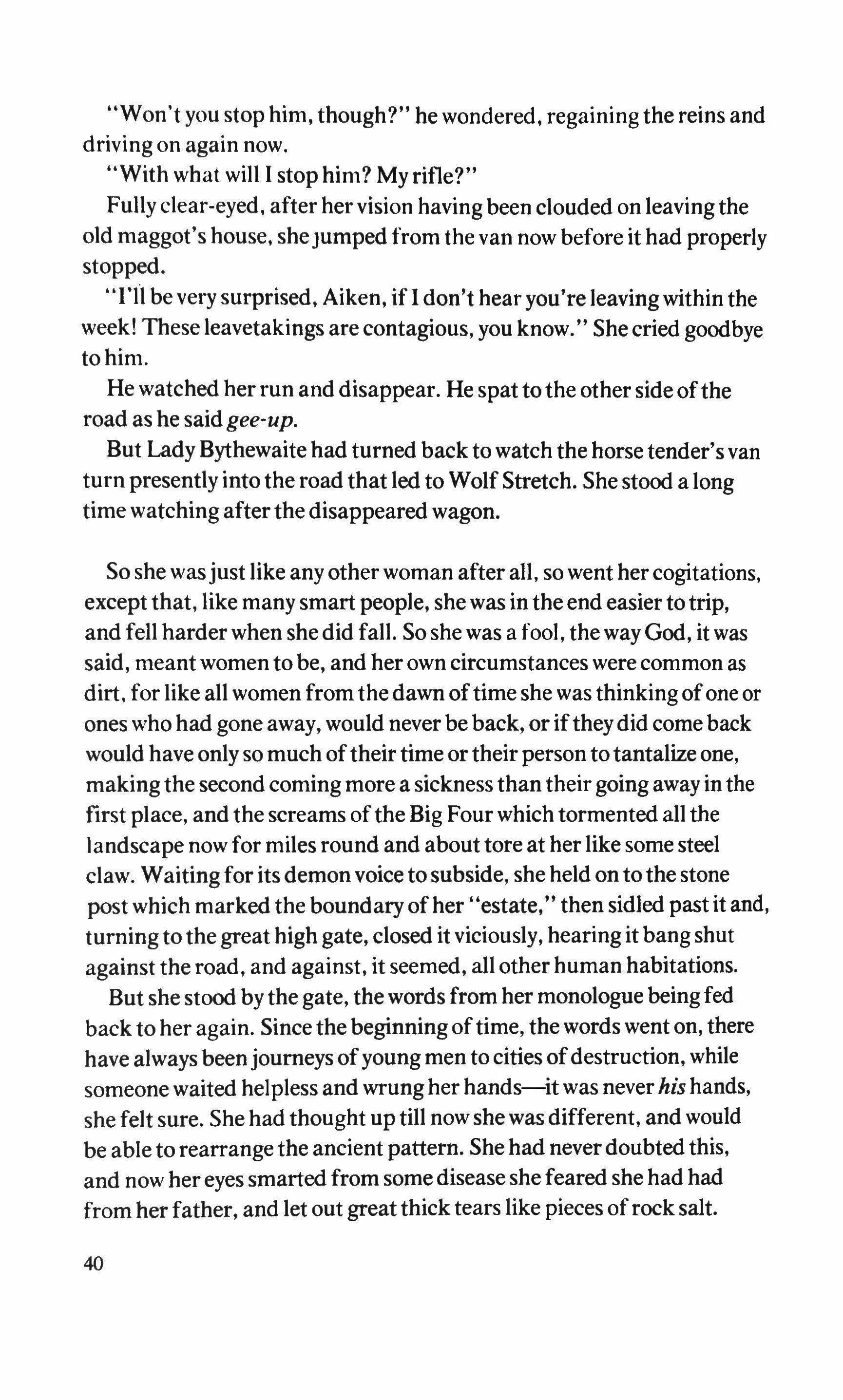
"Won't you stop him, though?" he wondered, regaining the reins and driving on again now.
"With what will I stop him? My rifle?"
Fullyclear-eyed, after her vision having been clouded on leavingthe old maggot's house, sheJumped from the van now before it had properly stopped •. I'u be very surprised, Aiken, if I don't hear you'releavingwithin the week! These leavetakings are contagious, you know." She cried goodbye to him.
He watched her run and disappear. He spat to the other side ofthe road as he said gee-up.
But LadyBythewaite had turned back to watch the horse tender's van turn presently into the road that led to Wolf Stretch. She stood a long time watching afterthe disappeared wagon.
So she was just like any other woman after all, so went hercogitations, exceptthat, like many smart people, she was in the end easier to trip, and fell harder when she did fall. So she was a fool, the way God, it was said, meant women to be, and her own circumstances were common as dirt, for like all women from the dawn oftime she was thinkingof one or ones who had gone away, would never be back, or ifthey did come back would have only so much oftheir time or their person to tantalize one, making the second coming more a sickness than their going away in the first place, and the screams ofthe Big Four which tormented all the landscape now for miles round and about tore at her like some steel claw. Waiting for its demon voice to subside, she held on to the stone post which marked the boundary ofher "estate," then sidled past it and, turning to the great high gate, closed it viciously, hearing it bang shut against the road, and against, it seemed, all other human habitations.
But she stood bythe gate, the words from her monologuebeing fed back to her again. Since the beginning oftime, the words went on, there have always beenjourneys ofyoung men to cities ofdestruction, while someone waited helpless and wrungher hands-it was never his hands, she felt sure. She had thought up till now she was different, and would be able to rearrange the ancient pattern. She had never doubted this, and now her eyes smarted from some disease she feared she had had from her father, and let out great thick tears like pieces ofrock salt.
40
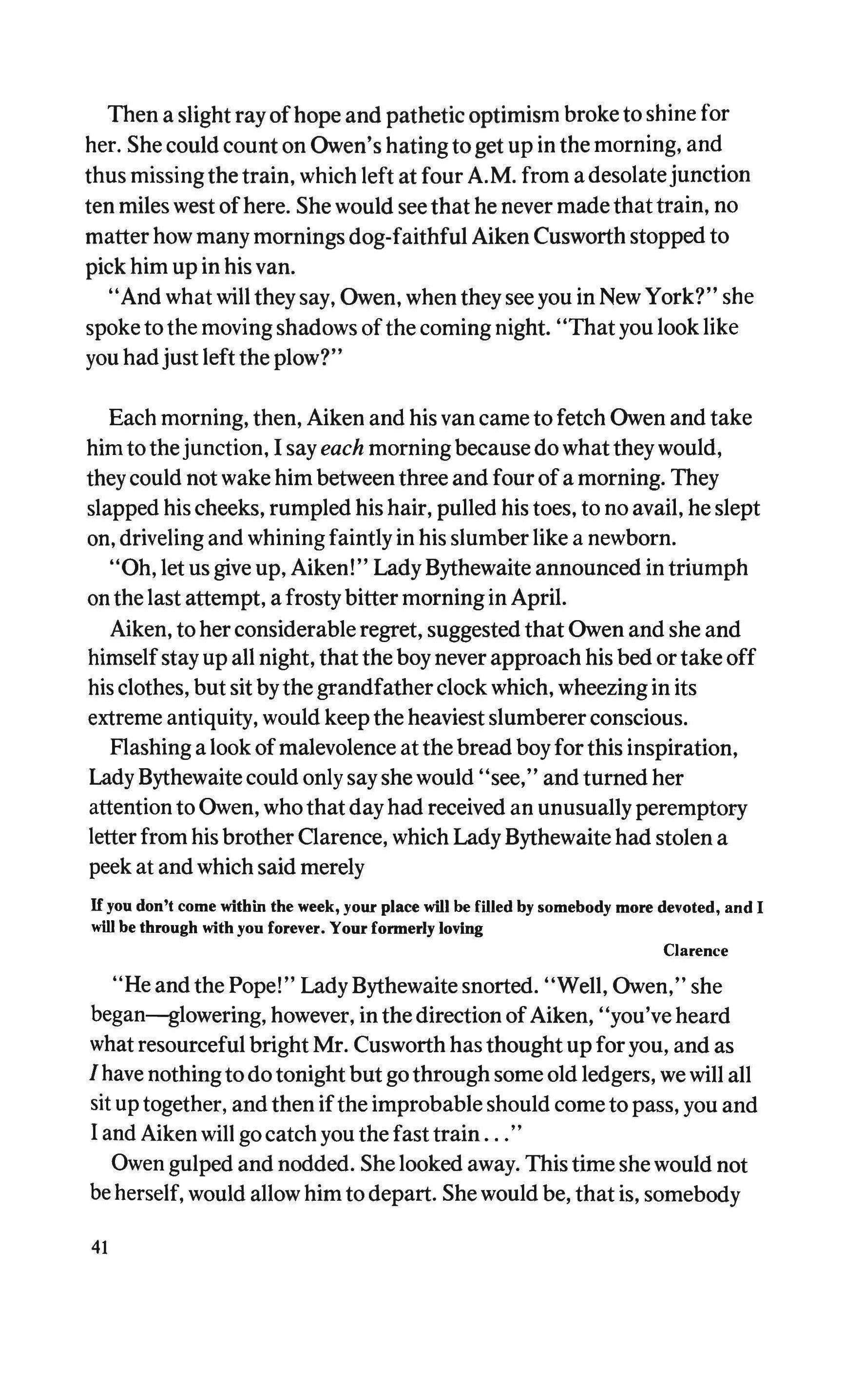
Then a slight rayofhope and patheticoptimism broke to shine for her. She could count on Owen's hating to get up in the morning, and thus missingthetrain, which left at four A.M. from a desolatejunction ten miles west ofhere. She would see that he never madethattrain, no matter how many morningsdog-faithful Aiken Cusworth stopped to pick him up in his van.
"And what will they say, Owen, when they see you in New York?" she spoke to the moving shadows ofthe comingnight. "That you look like you hadjust left the plow?"
Each morning, then, Aiken and his van came to fetch Owen and take him to thejunction. I say each morningbecause do whattheywould, they could not wake him between three and fourof a morning. They slapped his cheeks, rumpled his hair, pulled his toes, to no avail, he slept on, driveling and whiningfaintly in his slumber like a newborn.
"Oh, let us give up, Aiken!" LadyBythewaite announced in triumph on the last attempt, a frostybitter morningin April.
Aiken, to her considerable regret, suggested that Owen and she and himselfstay up all night, that the boy never approach his bed or take off his clothes, but sit bythe grandfather clock which, wheezing in its extreme antiquity, would keep the heaviest slumberer conscious.
Flashing a look ofmalevolence at the bread boyforthis inspiration, Lady Bythewaite could only say she would "see," and turned her attention to Owen, whothat day had received an unusuallyperemptory letter from his brother Clarence, which LadyBythewaite had stolen a peek at and which said merely
H you don't come witbin the week, your place will be filled by somebody more devoted, and I will be through with you forever. Your formerly loving Clarence
"He and the Pope!" LadyBythewaite snorted. "Well, Owen," she began-glowering, however, in thedirection ofAiken, "you've heard what resourceful bright Mr. Cusworth has thought up foryou, and as Ihave nothing to do tonight but go through some old ledgers, we will all sit up together, and then ifthe improbable should come to pass, you and I and Aiken will go catch you the fasttrain Owen gulped and nodded. She looked away. This time she would not be herself, would allow him to depart. She would be, that is, somebody
41
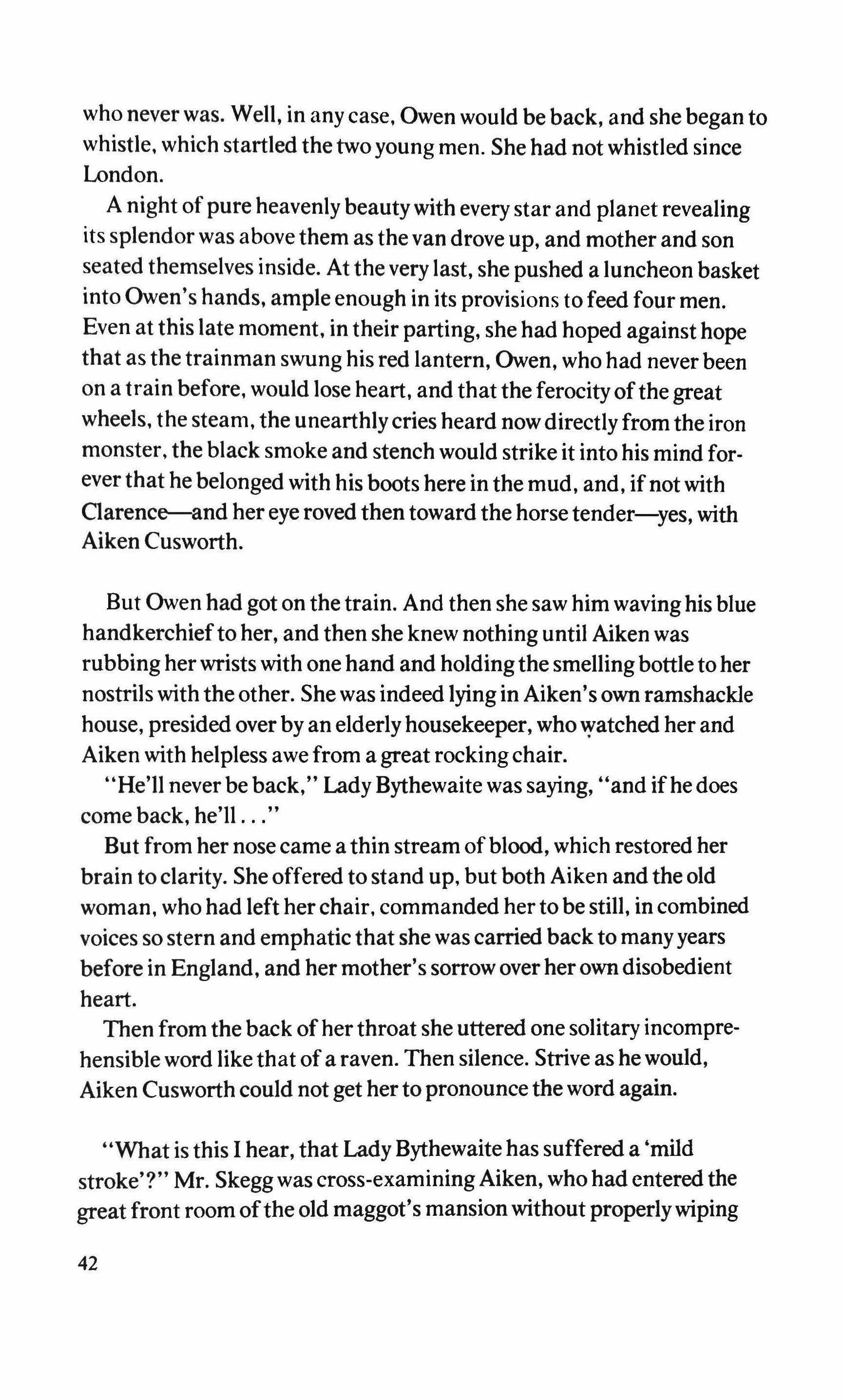
who never was. Well, in any case, Owen would be back, and she began to whistle. which startled the two young men. She had not whistled since London.
A night of pure heavenlybeautywith every star and planetrevealing its splendor was above them as the van drove up, and mother and son seated themselves inside. At the very last, she pushed a luncheon basket into Owen's hands, ampleenough in its provisions to feed four men. Even at this late moment, in their parting, she had hoped againsthope that as the trainman swung his red lantern, Owen, who had never been on a train before, would lose heart, and that the ferocity ofthe great wheels. the steam, the unearthlycries heard now directly from the iron monster, the black smoke and stench would strike it into his mind forever that he belonged with his boots here in the mud, and, ifnot with Oarence-and her eye roved then toward the horse tender-yes, with Aiken Cusworth.
But Owen had got on the train. And then she saw him wavinghis blue handkerchiefto her, and then she knew nothing until Aiken was rubbing herwrists with one hand and holdingthe smellingbottle to her nostrils with the other. She was indeed lying in Aiken's own ramshackle house, presided over by an elderlyhousekeeper, whowatched her and Aiken with helpless awe from a great rockingchair.
"He'll never be back," LadyBythewaite was saying, "and ifhe does come back, he'll "
But from her nose came a thin stream ofblood, which restored her brain to clarity. She offered to stand up, but both Aiken and the old woman, who had left herchair, commanded her to be still, in combined voices so stern and emphatic that she was carried back to manyyears before in England, and her mother's sorrow over her own disobedient heart.
Then from the back ofherthroat she uttered one solitaryincomprehensible word like that of a raven. Then silence. Strive as he would, Aiken Cusworth could not get her to pronounce the word again.
"What is this I hear, that LadyBythewaite has suffered a 'mild stroke'?" Mr. Skegg was cross-examiningAiken, who had entered the great front room ofthe old maggot's mansion without properlywiping
42
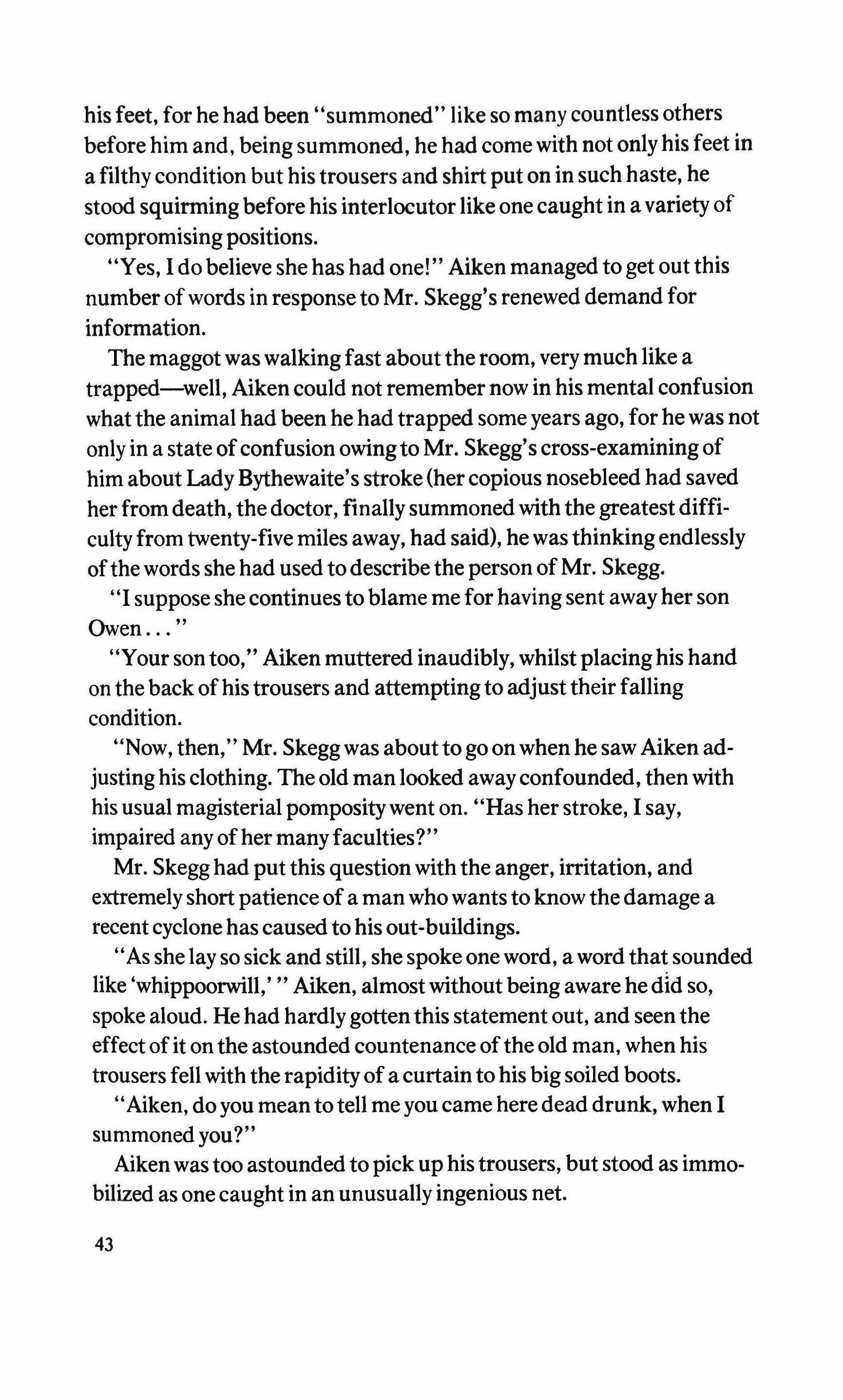
his feet, for he had been "summoned" like so many countless others before him and, beingsummoned, he had come with not only his feet in a filthy condition but his trousers and shirt put on in such haste, he stood squirmingbefore his interlocutorlike one caught in a variety of compromisingpositions.
"Yes, 1 do believe she has had one!" Aiken managed to get out this number ofwords in response to Mr. Skegg's renewed demand for information.
The maggot was walking fast about the room, very much like a trapped-well, Aiken could not remember now in his mental confusion whatthe animal had been he had trapped some years ago, for he was not only in a state ofconfusion owingto Mr. Skegg'scross-examiningof him about LadyBythewaite's stroke (hercopious nosebleed had saved her from death, the doctor, finally summoned with the greatest difficulty from twenty-five miles away, had said), he was thinkingendlessly ofthe words she had used to describe the person of Mr. Skegg.
"I suppose she continues to blame me for having sent away her son Owen
"Your son too," Aiken muttered inaudibly, whilst placing his hand on the back ofhis trousers and attemptingto adjusttheir faIling condition.
"Now, then," Mr. Skeggwas aboutto go on when he saw Aiken adjusting his clothing. The old man looked away confounded, then with his usual magisterialpomposity went on. "Has her stroke, 1 say, impaired any ofher many faculties?"
Mr. Skegg had put this question with the anger, irritation, and extremelyshort patience of a man who wants to know the damage a recent cyclone has caused to his out-buildings.
"As she lay so sick and still, she spoke one word, a word that sounded like 'whippoorwill,' " Aiken, almost without being aware he did so, spoke aloud. He had hardlygottenthis statement out, and seen the effect ofit on the astounded countenance oftheold man, when his trousers fell with the rapidity of a curtain to his bigsoiled boots.
"Aiken, do you mean to tell me you came here dead drunk, when 1 summoned you?"
Aiken was too astounded to pick up his trousers, but stood as immobilized as one caught in an unusuallyingenious net.
43
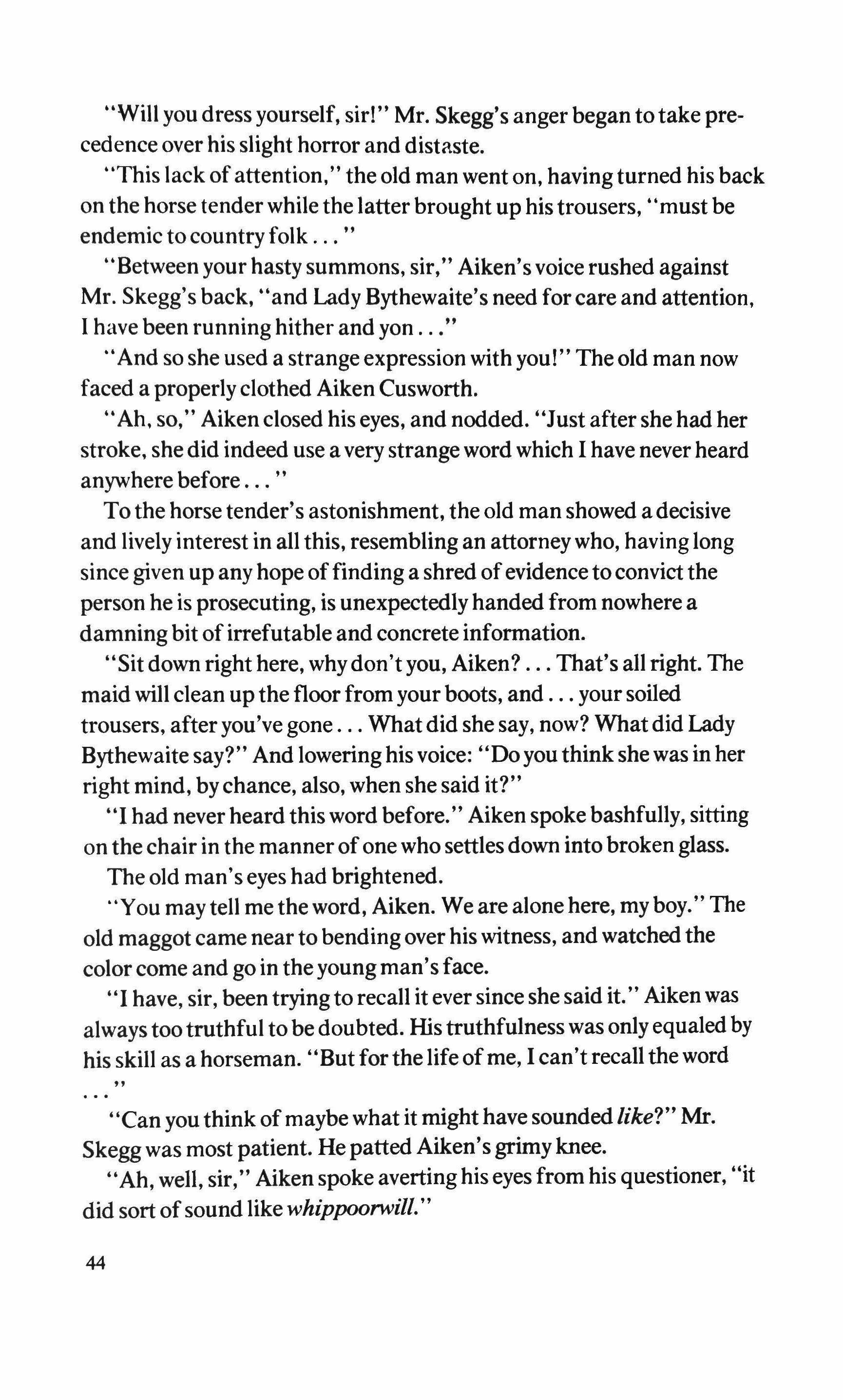
"Will you dress yourself, sir!" Mr. Skegg's anger began to take precedence over his slight horror and distaste.
"This lack ofattention," the old man went on, having turned his back on the horse tender while the latter brought up his trousers, "must be endemic to country folk
"Between your hasty summons, sir," Aiken's voice rushed against Mr. Skegg's back, "and Lady Bythewaite's need for care and attention, I have been running hither and yon
And so she used a strangeexpression with youl" The old man now faced a properly clothed Aiken Cusworth.
"Ah, so," Aiken closed his eyes, and nodded. "lust after she had her stroke. she did indeed use a very strange word which I have never heard anywhere before
To the horse tender's astonishment, the old man showed a decisive and lively interest in all this, resembling an attorneywho, havinglong since given up any hope offinding a shred ofevidence to convict the person he is prosecuting, is unexpectedly handed from nowhere a damning bit ofirrefutable and concrete information.
"Sit down right here, whydon't you, Aiken? That's all right. The maid will clean up the floor from your boots, and yoursoiled trousers, afteryou've gone What did she say, now? What did Lady Bythewaitesay?" And lowering his voice: "Doyou think she was in her right mind, bychance, also, when she said it?"
"I had never heard this word before." Aiken spokebashfully, sitting on the chair in the manner of one who settles down into broken glass.
The old man's eyes had brightened.
"You may tell me the word, Aiken. We are alone here, my boy." The old maggot came near to bending over his witness, and watched the color come and go in the youngman's face
I have, sir, been trying to recall it ever since she said it." Aiken was always too truthful to be doubted. His truthfulness was onlyequaledby his skill as a horseman. "But forthe life of me, I can't recall the word
"Can you think ofmaybe what it might have sounded like?" Mr. Skegg was most patient. He patted Aiken's grimy knee.
"Ah, well, sir," Aiken spokeaverting his eyes from his questioner, "it did sort ofsound like whippoorwill.
44
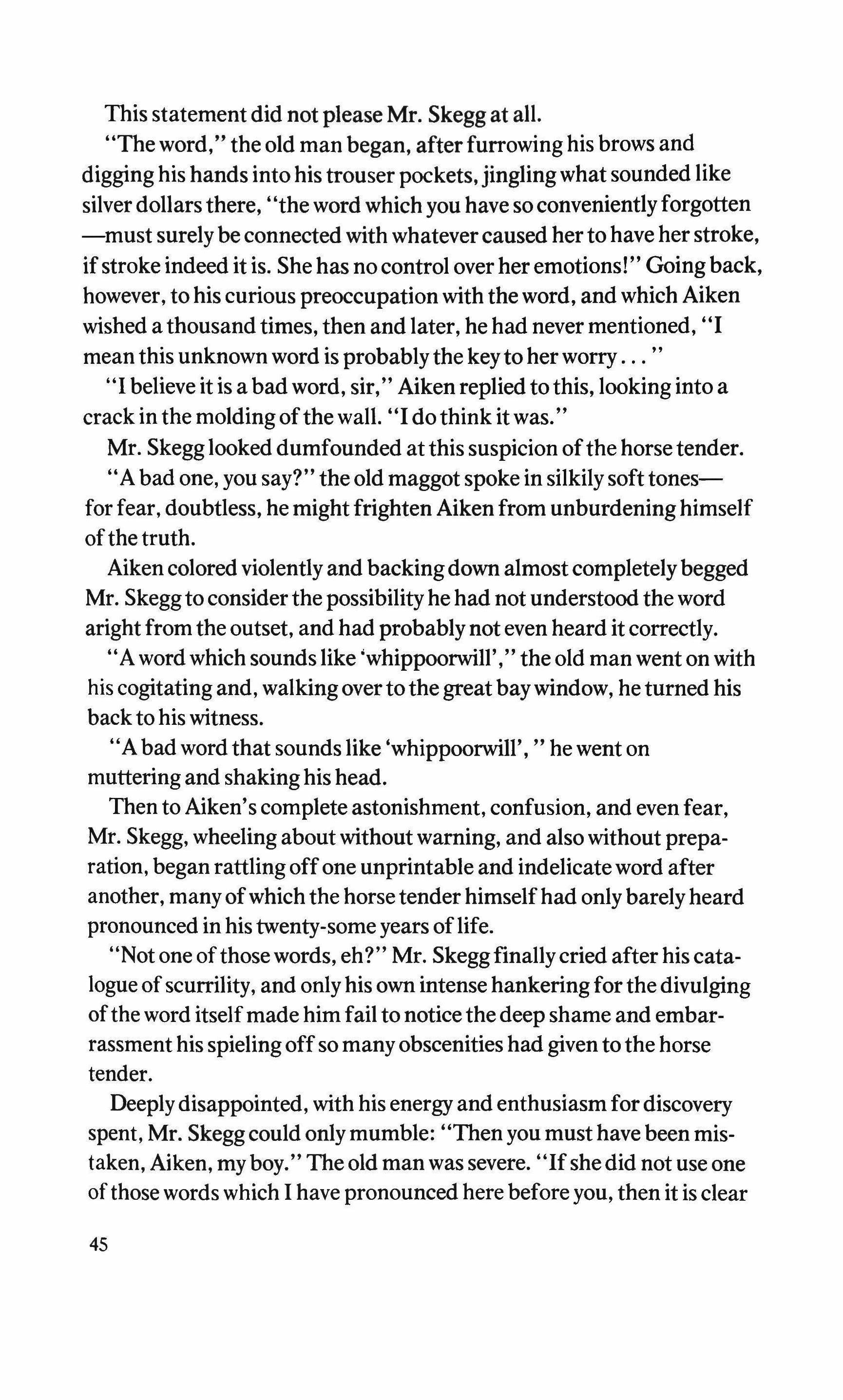
This statement did not please Mr. Skegg at all.
"The word," the old man began, after furrowing his brows and digging his hands into his trouser pockets,jingling what sounded like silver dollars there, "the word which you have so convenientlyforgotten -must surelybeconnected with whatevercaused her to have her stroke, ifstroke indeed it is. She has no control over her emotions!" Goingback, however, to his curious preoccupation with the word, and which Aiken wished a thousand times, then and later, he had never mentioned, "I mean this unknown word is probablythe keyto her worry
"I believe it is a bad word, sir," Aiken replied to this, looking into a crack in the moldingofthe wall. "I do think itwas."
Mr. Skegg looked dumfounded at this suspicion ofthe horsetender.
"A bad one, you say?" the old maggot spoke in silkilysoft tonesfor fear, doubtless, he mightfrighten Aiken from unburdeninghimself ofthe truth.
Aiken colored violently and backingdown almostcompletelybegged Mr. Skeggto considerthe possibility he had not understood the word aright from the outset, and had probably not even heard it correctly.
"Awordwhich sounds like 'whippoorwill'," the old man went on with his cogitatingand, walking over to the greatbaywindow, heturned his back to his witness.
"A bad word that sounds like 'whippoorwill', he went on muttering and shakinghis head.
Then to Aiken's completeastonishment, confusion, and even fear, Mr. Skegg, wheeling about without warning, and also without preparation, beganrattlingoff one unprintable and indelicateword after another, many ofwhich the horsetender himselfhad onlybarely heard pronounced in his twenty-some years oflife.
"Not one ofthose words, eh?" Mr. Skeggfinallycried after his catalogue ofscurrility, and only his own intense hankering forthe divulging ofthe word itselfmade him fail to notice thedeep shame and embarrassment his spieling off so many obscenities had given to the horse tender.
Deeplydisappointed, with his energy and enthusiasm fordiscovery spent, Mr. Skeggcould onlymumble: "Then you must have been mistaken, Aiken, my boy." The old man was severe. "If shedid not use one ofthose words which I have pronounced here before you, then it is clear
4S
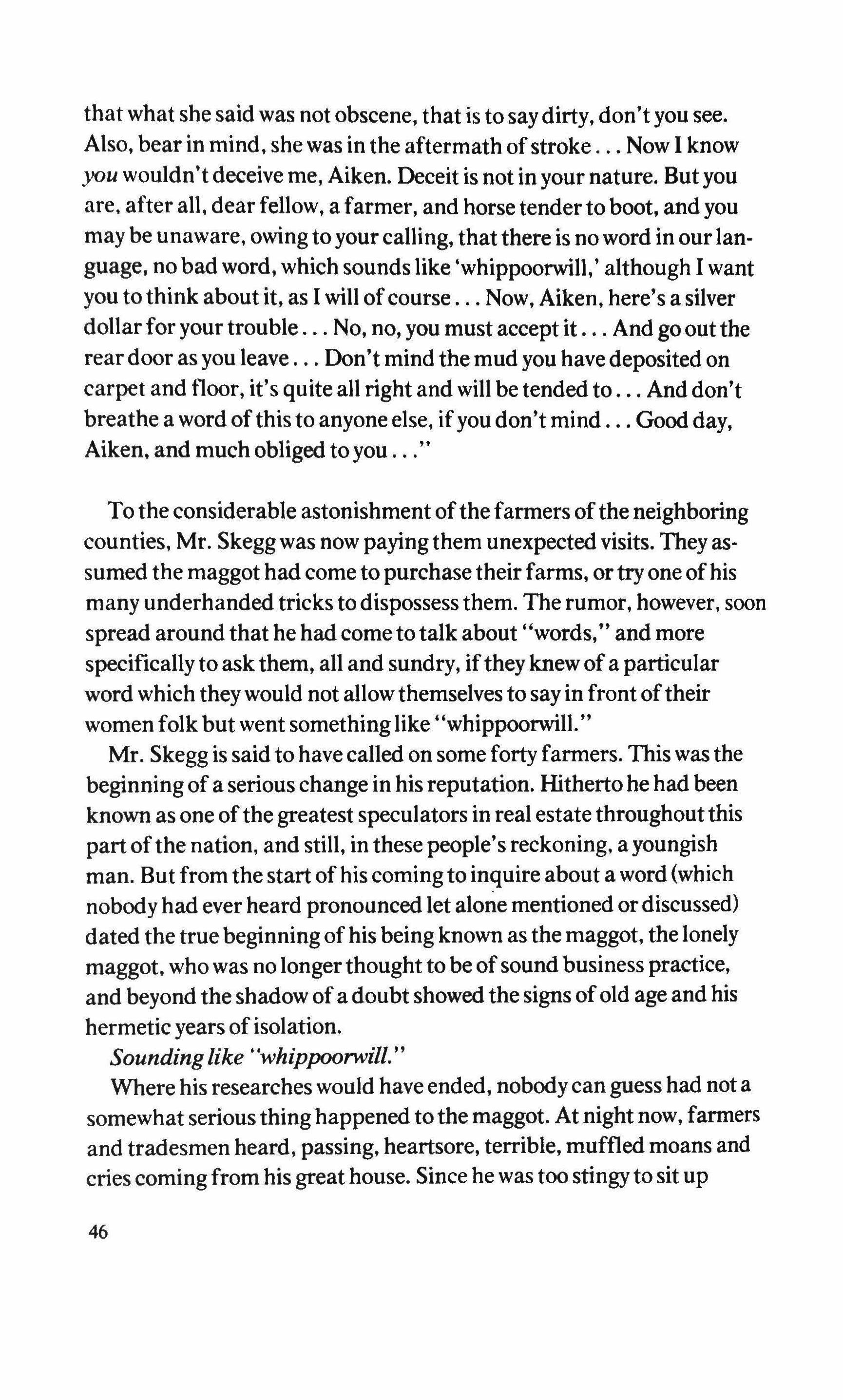
that what she said was not obscene, that is to saydirty, don't you see. Also, bear in mind, she was in the aftermath ofstroke Now I know you wouldn't deceive me, Aiken. Deceit is not in your nature. But you are, after all, dear fellow, a farmer, and horse tender to boot, and you may be unaware, owing to your calling, thatthere is no word in our language, no bad word, which sounds like 'whippoorwill,' although I want you to think about it, as I will of course Now, Aiken, here's a silver dollar for your trouble No, no, you must accept it And go out the rear door as you leave Don't mind the mud you have deposited on carpet and floor, it's quite all right and will be tended to And don't breathe a word ofthis to anyone else, ifyou don't mind Good day, Aiken, and much obliged to you
To the considerable astonishment ofthe farmers ofthe neighboring counties, Mr. Skegg was now payingthem unexpected visits. Theyassumed the maggot had come to purchase their farms, or try one ofhis many underhanded tricks to dispossess them. The rumor, however, soon spread around that he had come to talk about "words," and more specifically to ask them, all and sundry, iftheyknewof a particular word which they would not allow themselves to say in front oftheir women folk but went something like "whippoorwill."
Mr. Skegg is said to have called on some forty farmers. This was the beginning of a serious change in his reputation. Hitherto he had been known as one ofthe greatest speculators in real estate throughoutthis partofthe nation, and still, in these people'sreckoning, a youngish man. But from the start ofhis coming to inquire about a word (which nobody had ever heard pronounced let alone mentioned or discussed) dated the true beginning of his being known as the maggot, the lonely maggot, who was no longerthought to be ofsound business practice, and beyond the shadow of a doubt showed the signs ofold age and his hermetic years ofisolation.
Sounding like''whippoorwill."
Where his researches would have ended, nobody can guess had not a somewhat serious thinghappened to the maggot. At night now, farmers and tradesmen heard, passing, heartsore, terrible, muffled moans and cries coming from his great house. Since he was too stingy to sit up
46
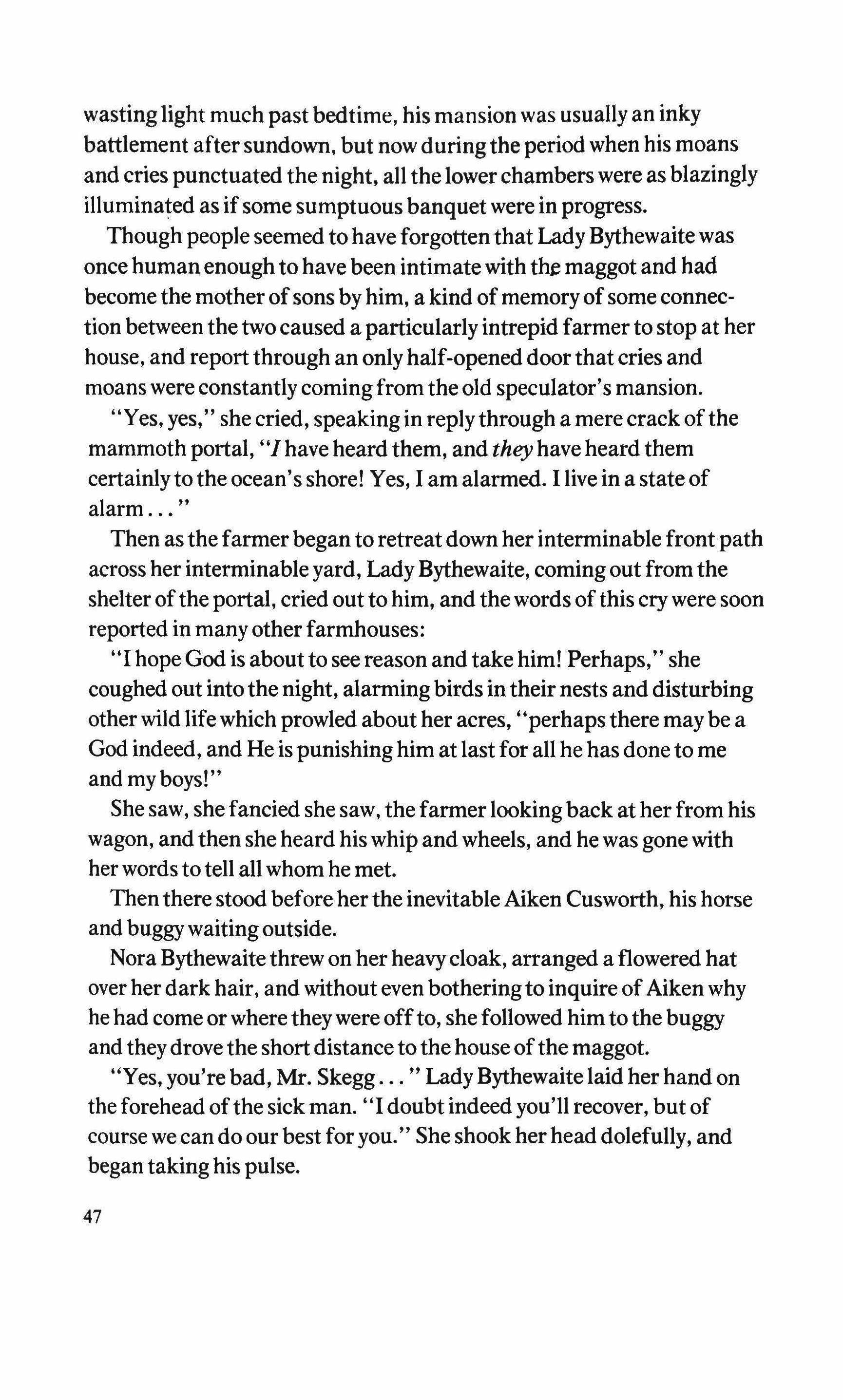
wastinglight much past bedtime, his mansion was usually an inky battlement after sundown, but now duringthe period when his moans and cries punctuated the night, all the lower chambers were as blazingly illuminated as if some sumptuousbanquet were in progress.
Though people seemed to have forgotten that LadyBythewaite was once human enough to have been intimate with the maggot and had become the mother of sons byhim, a kind of memory of some connection between the two caused a particularlyintrepid farmer to stop at her house, and reportthrough an onlyhalf-opened door that cries and moans were constantlycoming from the old speculator's mansion.
"Yes, yes," she cried, speaking in replythrough a mere crack ofthe mammoth portal, "Ihave heard them, and they have heard them certainly to the ocean's shore! Yes, 1 am alarmed. 1 live in a state of alarm "
Then as the farmerbegan to retreat down her interminable front path across her interminableyard, LadyBythewaite, coming out from the shelter ofthe portal, cried out to him, and thewords ofthis cry were soon reported in many other farmhouses:
"I hope God is about to see reason and take him! Perhaps," she coughed out intothe night, alarming birds in their nests and disturbing other wild life which prowled about her acres, "perhaps there may be a God indeed, and He is punishing him at last for all he has done to me and my boys!"
She saw, she fancied she saw, the farmer lookingback at her from his wagon, and then she heard his whip and wheels, and he was gone with her words to tell all whom he met.
Then there stood before her the inevitable Aiken Cusworth, his horse and buggywaiting outside.
Nora Bythewaite threw on her heavycloak, arranged a flowered hat over her dark hair, and without even bothering to inquire ofAiken why he had come or where they were offto, she followed him to the buggy and they drove the short distance to the houseofthe maggot.
"Yes, you'rebad, Mr. Skegg LadyBythewaite laid her hand on the forehead ofthe sick man. "I doubt indeed you'II recover, but of course we can do our best for you." She shook herhead dolefully, and begantakinghis pulse.
47
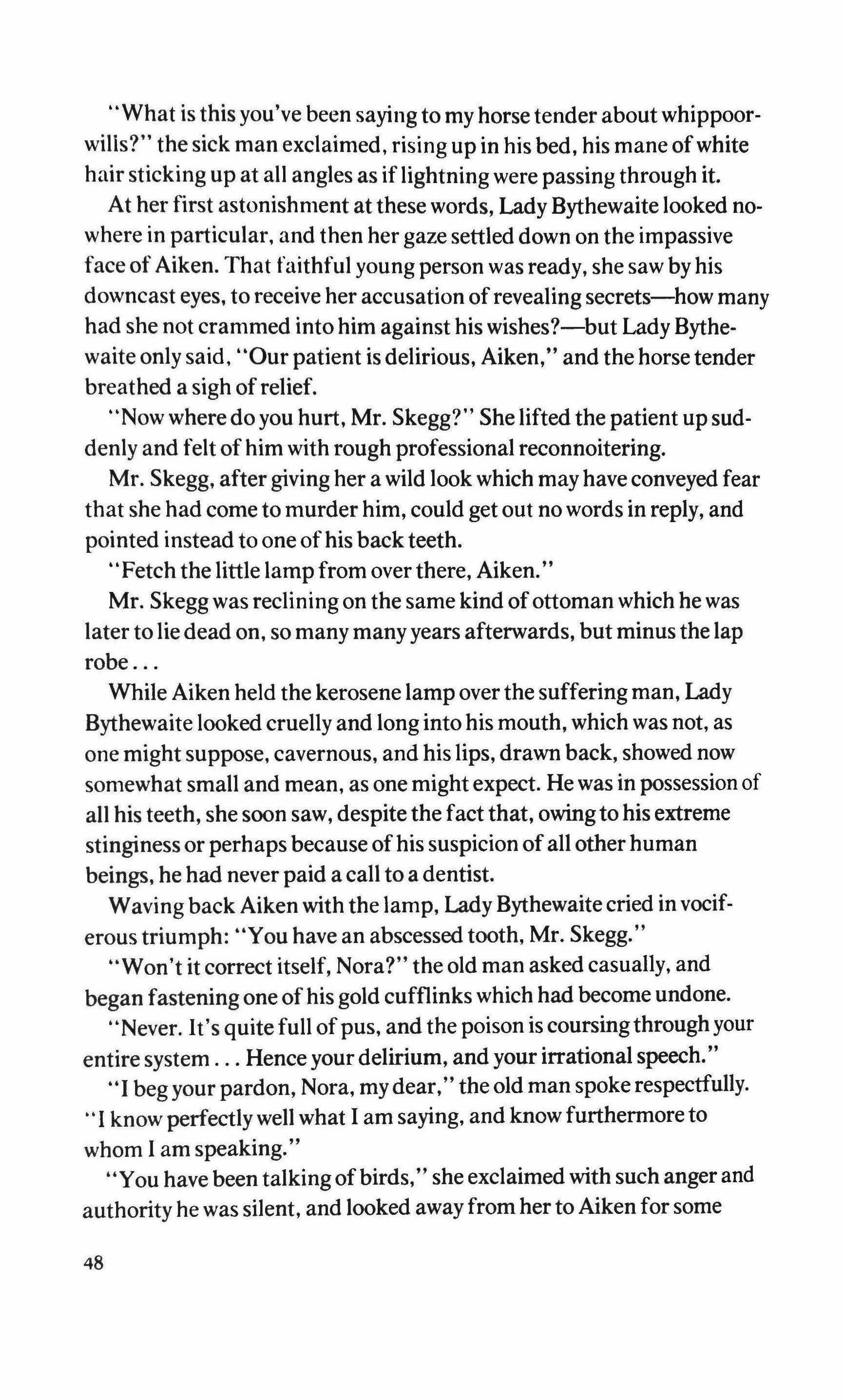
"What is this you've been saying to my horse tender about whippoorwills?" the sick man exclaimed, rising up in his bed, his mane ofwhite hair sticking up at all angles as if lightning were passing through it.
At her first astonishment at these words, Lady Bythewaite looked nowhere in particular, and then her gaze settled down on the impassive face of Aiken. That faithful young person was ready, she saw by his downcast eyes, to receive her accusation ofrevealing secrets-how many had she not crammed into him against his wishes?-but LadyBythewaite only said. "Our patient is delirious, Aiken," and the horse tender breathed a sigh ofrelief.
"Now where do you hurt, Mr. Skegg?" She lifted the patient up suddenly and felt of him with rough professional reconnoitering.
Mr. Skegg, after giving her a wild look which may have conveyed fear that she had come to murder him, could get out no words in reply, and pointed instead to one ofhis back teeth.
"Fetch the little lamp from over there, Aiken."
Mr. Skegg was reclining on the same kind of ottoman which he was later to lie dead on, so many manyyears afterwards, but minus the lap robe
While Aiken held the kerosene lamp over the suffering man, Lady Bythewaite looked cruelly and long into his mouth, which was not, as one might suppose, cavernous, and his lips, drawn back, showed now somewhat small and mean, as one mightexpect. He was in possession of all his teeth, she soon saw, despite the fact that, owingto his extreme stinginess or perhaps because ofhis suspicion ofall other human beings, he had never paid a call to a dentist.
Waving back Aiken with the lamp, LadyBythewaite cried in vociferous triumph: "You have an abscessed tooth, Mr. Skegg."
"Won't it correct itself, Nora?" the old man asked casually, and began fastening one of his gold cufflinks which had become undone.
"Never. It's quite full ofpus, and the poison is coursingthrough your entire system Hence your delirium, and your irrational speech."
"I beg your pardon, Nora, my dear," the old man spokerespectfully I know perfectlywell what I am saying, and know furthermore to whom I am speaking."
"You have been talkingofbirds," she exclaimed with such anger and authority he was silent, and looked away from her to Aiken for some
48
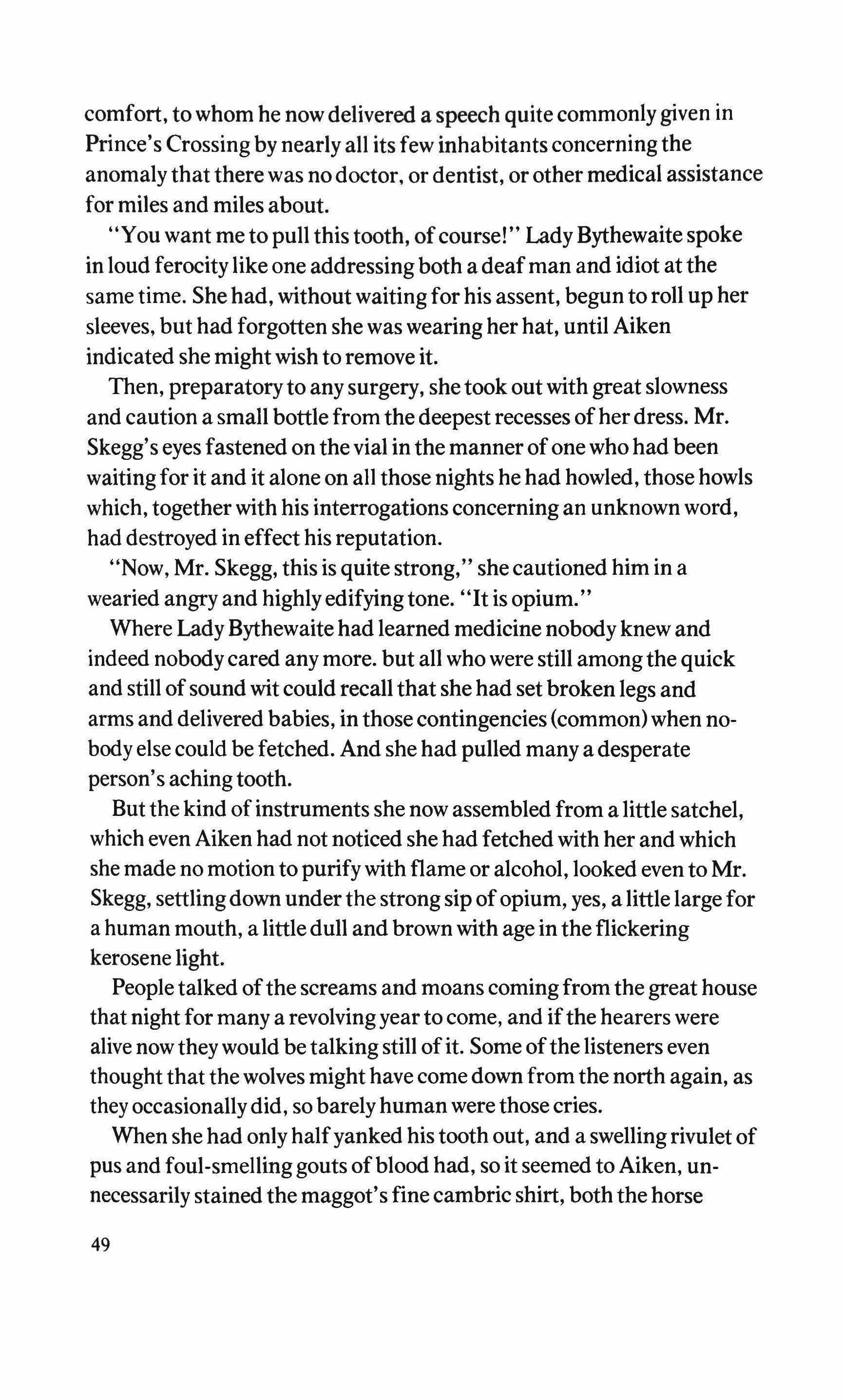
comfort, to whom he now delivered a speech quitecommonlygiven in Prince's Crossingbynearly all its few inhabitants concerning the anomaly that there was no doctor, or dentist, or other medical assistance for miles and miles about.
"You want me to pull this tooth, ofcourse!" LadyBythewaitespoke in loud ferocity like one addressingboth a deaf man and idiot at the same time. She had, without waiting for his assent, begun to roll up her sleeves, but had forgotten she was wearing her hat, until Aiken indicated she mightwish to remove it.
Then, preparatory to any surgery, shetook out with great slowness and caution a small bottle from the deepest recesses ofherdress. Mr. Skegg's eyes fastened on the vial in the manner of one who had been waitingfor it and it alone on all those nights he had howled, those howls which, together with his interrogationsconcerning an unknown word, had destroyed in effect his reputation.
"Now, Mr. Skegg, this is quitestrong," she cautioned him in a wearied angry and highlyedifying tone. "It is opium."
Where LadyBythewaite had learned medicine nobody knew and indeed nobody cared any more. but all who were still among the quick and still ofsound wit could recall that she had set broken legs and arms and delivered babies, in those contingencies(common)when nobody else could be fetched. And she had pulled many a desperate person'saching tooth.
But the kind of instruments she now assembled from a little satchel, which even Aiken had not noticed she had fetched with her and which she made no motion to purifywith flame or alcohol,looked even to Mr. Skegg, settlingdown under the strongsip ofopium, yes, a little large for a human mouth, a little dull and brown with age in the flickering kerosene light.
People talked ofthe screams and moans coming from the great house that night for many a revolvingyear to come, and ifthe hearers were alive now they would be talking still ofit. Some ofthe listeners even thought that the wolves might have come down from the north again, as theyoccasionallydid, so barely human were those cries.
When she had only halfyanked his tooth out, and a swellingrivulet of pus and foul-smellinggouts ofblood had, so it seemed to Aiken, unnecessarily stained the maggot's fine cambric shirt, both the horse
49
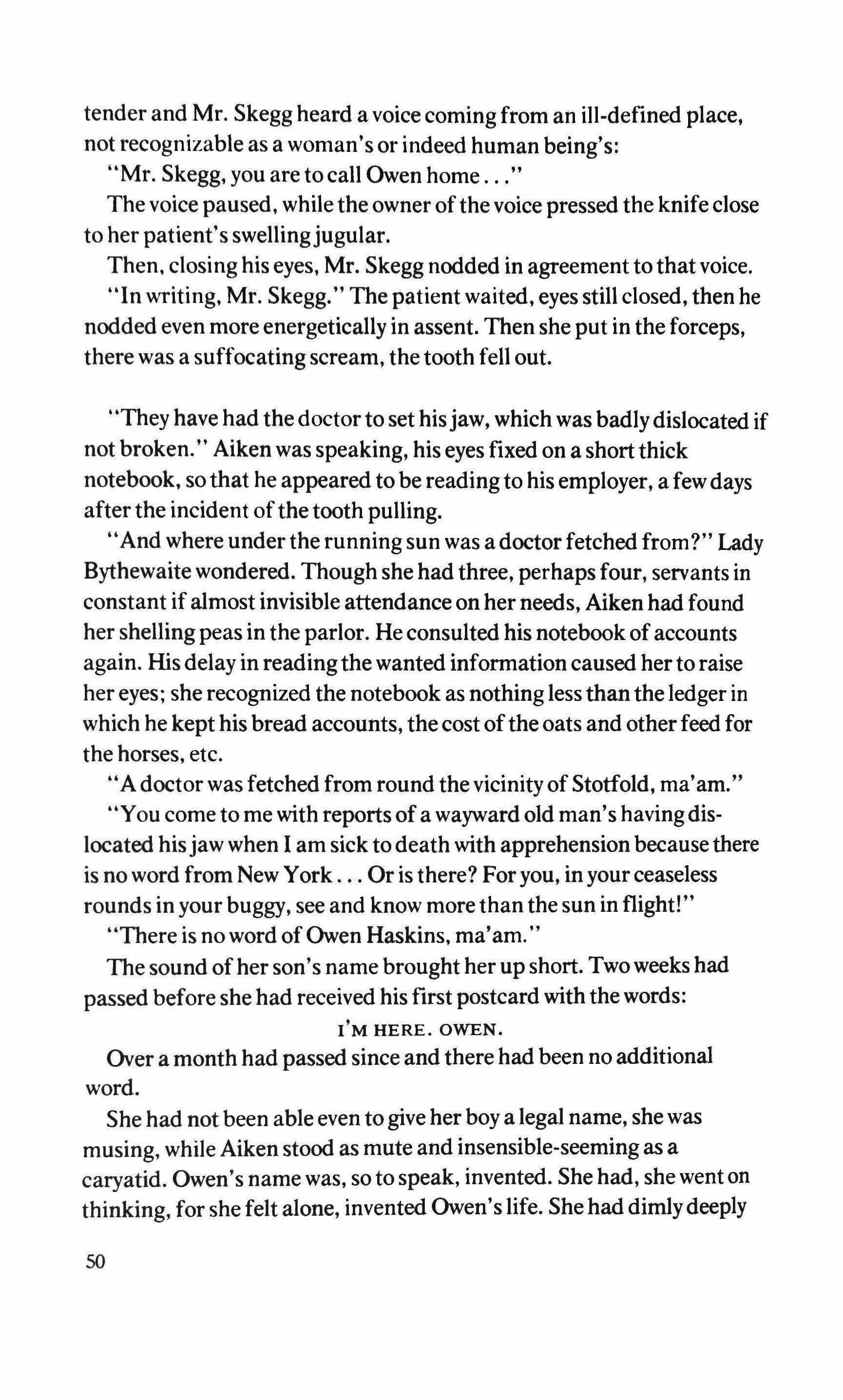
tender and Mr. Skegg heard a voice coming from an ill-defined place, not recognizable as a woman's or indeed human being's:
"Mr. Skegg, you are to call Owen home
The voice paused. while the owner ofthe voice pressed the knife close to her patient'sswellingjugular.
Then. closing his eyes. Mr. Skegg nodded in agreement to that voice.
"In writing. Mr. Skegg." The patient waited. eyes still closed, then he nodded even more energetically in assent. Then she put in the forceps, there was a suffocating scream, the tooth fell out.
"They have had the doctor to set hisjaw, which was badlydislocated if not broken." Aiken was speaking, his eyes fixed on a short thick notebook. so that he appeared to be reading to his employer, a fewdays afterthe incident ofthe tooth pulling,
"And where under the running sun was a doctor fetched from?" Lady Bythewaite wondered. Though she had three, perhaps four, servants in constant ifalmost invisible attendance on her needs, Aiken had found her shelling peas in the parlor. He consulted his notebook of accounts again. His delay in readingthe wanted information caused her to raise her eyes; she recognized the notebook as nothing less thanthe ledger in which he kept his bread accounts, the cost ofthe oats and otherfeed for the horses. etc.
"A doctor was fetched from round the vicinity of Stotfold, rna'am."
"You come to me with reports of a wayward old man's havingdislocated hisjaw when I am sick to death with apprehension becausethere is no word from New York Or is there? Foryou, in your ceaseless rounds in your buggy, see and know more than the sun in flight!"
"There is no word ofOwen Haskins. rna'am.'
The sound ofher son's name brought her up short. Twoweeks had passed before she had received his first postcard with the words: I'M HERE. OWEN.
Over a month had passed since and there had been no additional word.
She had not been able even to give her boy a legal name, she was musing, while Aiken stood as mute and insensible-seeming as a caryatid. Owen's name was, so to speak, invented. She had, she went on thinking, for she felt alone, invented Owen's life. She had dimlydeeply so
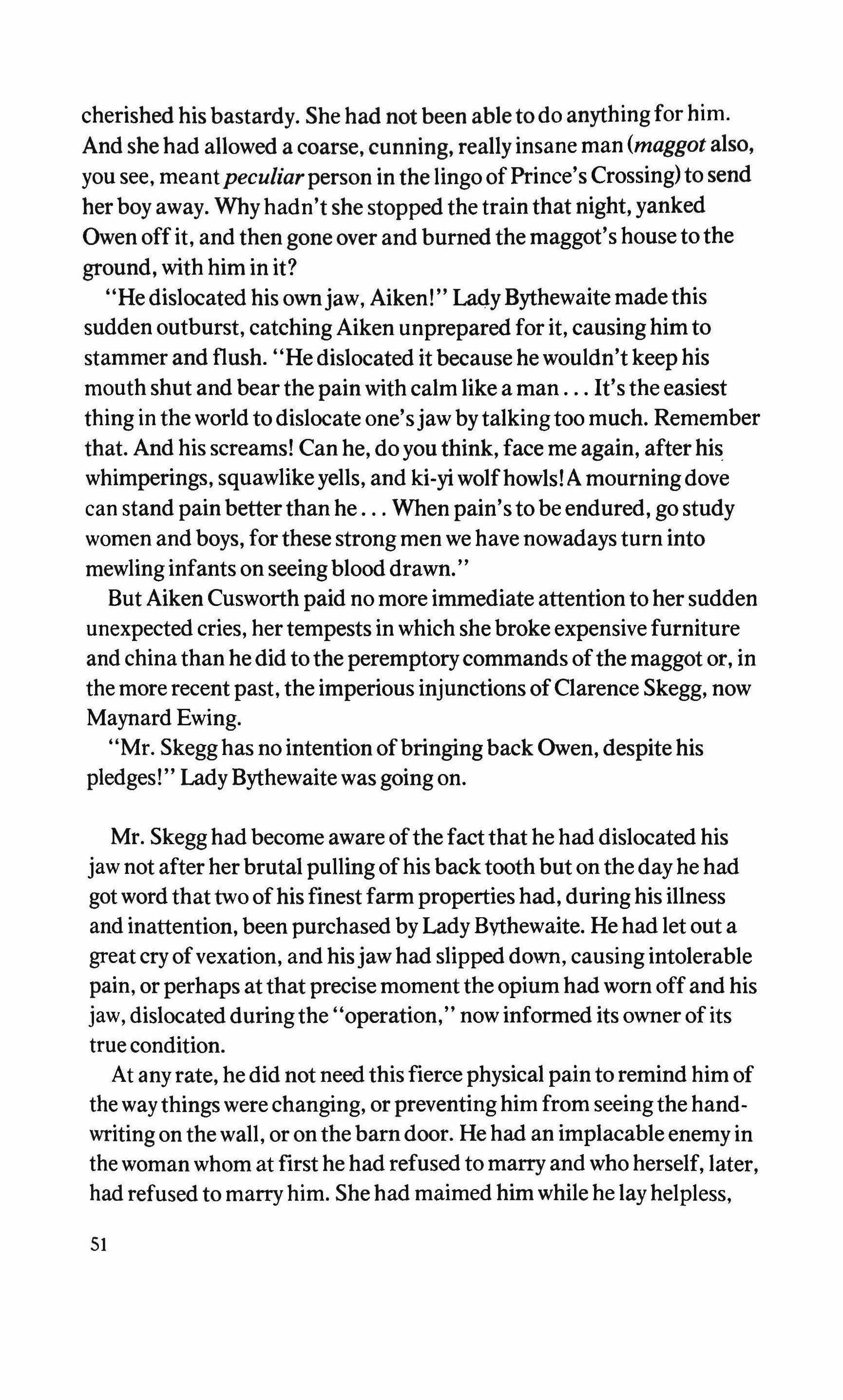
cherished his bastardy. She had not been able to do anythingfor him. And she had allowed a coarse, cunning, really insane man (maggot also, you see, meantpeculiarperson in the lingo ofPrince's Crossing) to send herboy away. Why hadn't she stopped the train that night,yanked Owen offit, and then gone over and burned the maggot's house to the ground, with him in it?
"He dislocated his own jaw, Aiken!" LadyBythewaite madethis sudden outburst, catching Aiken unprepared for it, causing him to stammer and flush. "He dislocated it because he wouldn't keep his mouth shut and bear the painwith calm like a man It's the easiest thing in the world to dislocate one'sjawbytalking too much. Remember that. And his screams! Can he, do you think, face me again, after his whimperings, squawlikeyells, and ki-yi wolfhowls! A mourningdove can stand pain betterthan he When pain's to be endured, go study women and boys, forthese strong men we have nowadays turn into mewlinginfants on seeingblood drawn."
But Aiken Cusworth paid no more immediate attention to her sudden unexpected cries, her tempests in which she broke expensive furniture and china than he did to the peremptory commands ofthe maggot or, in the more recent past, the imperiousinjunctions ofClarence Skegg, now Maynard Ewing.
"Mr. Skegg has no intention ofbringingback Owen, despite his pledges!" LadyBythewaite was going on.
Mr. Skegg had become aware ofthe fact that he had dislocated his jaw not after herbrutal pulling of his backtooth but on the day he had got word that two ofhis finest farm properties had, during his illness and inattention, been purchased by LadyBvthewaite, He had let out a great cry ofvexation, and hisjawhad slipped down, causing intolerable pain, or perhaps at that precise moment the opium had worn off and his jaw, dislocated duringthe "operation," now informed its owner of its true condition.
At any rate, he did not need this fierce physical pain to remind him of the way things were changing, or preventing him from seeingthe handwriting on thewall, or on the barn door. He had an implacable enemy in the woman whom at first he had refused to marry and who herself, later, had refused to marry him. She had maimed him while he layhelpless,
51
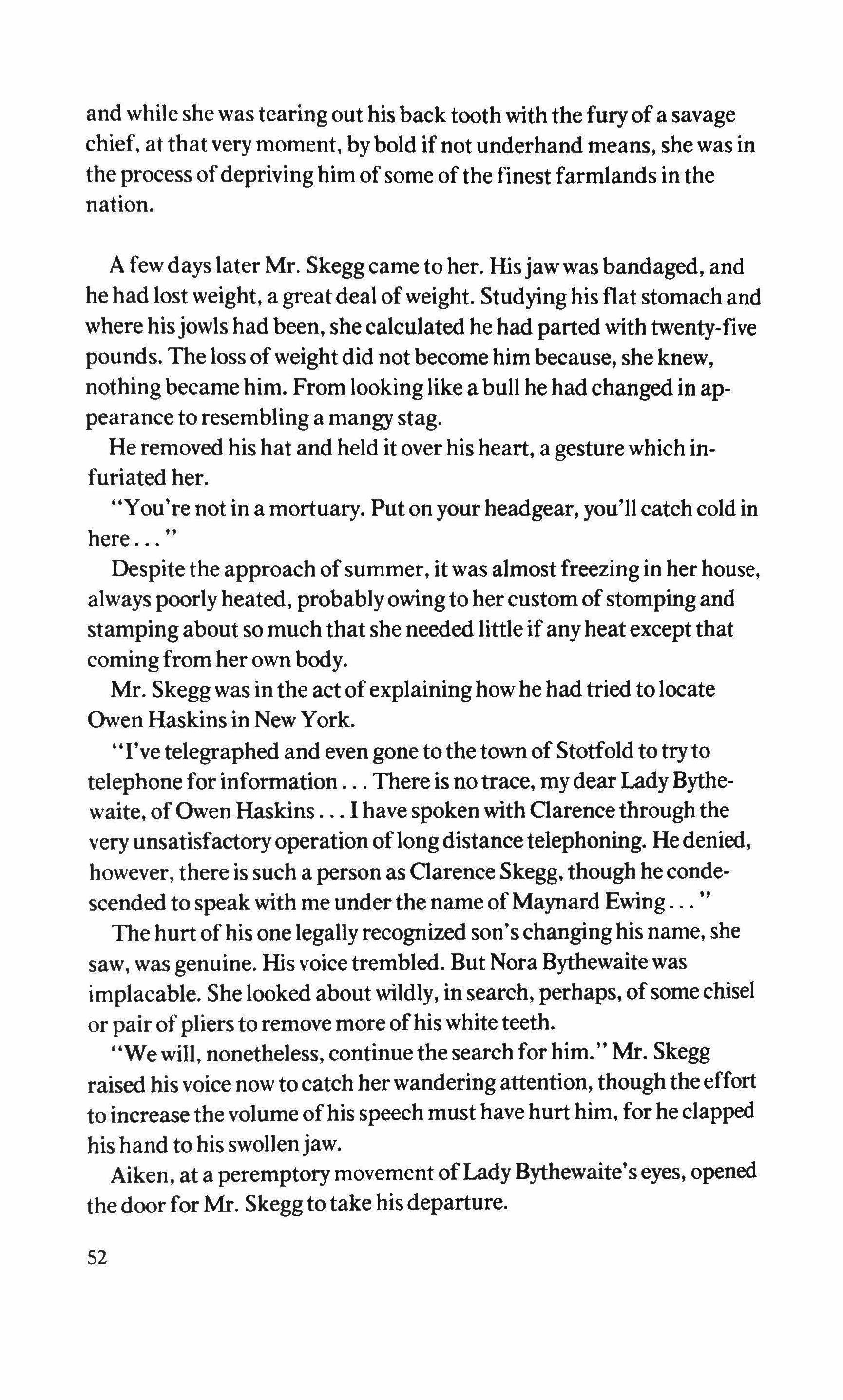
and while she was tearing out his back tooth with the fury of a savage chief, at that very moment, by bold if not underhand means, she was in the process ofdepriving him of some of the finest farmlands in the nation.
A few days later Mr. Skegg came to her. Hisjaw was bandaged, and he had lost weight, a great deal ofweight. Studying his flat stomach and where hisjowls had been, she calculated he had parted with twenty-five pounds. The loss ofweight did not become him because, she knew, nothing became him. From looking like a bull he had changed in appearance to resembling a mangy stag.
He removed his hat and held it over his heart, a gesture which infuriated her
You're not in a mortuary. Put on your headgear, you'll catch cold in here "
Despite the approach of summer, it was almost freezing in her house, always poorlyheated, probablyowing to her custom ofstomping and stamping about so much that she needed little if any heat except that comingfrom her own body.
Mr. Skegg was in the act ofexplaining how he had tried to locate Owen Haskins in New York
I've telegraphed and even gone to the town of Stotfold to try to telephone for information There is no trace, my dear LadyBythewaite, of Owen Haskins I have spoken with Clarence through the very unsatisfactoryoperation oflongdistance telephoning. He denied, however, there is such a person as Clarence Skegg, though he condescended to speak with me underthe name ofMaynard Ewing "
The hurt of his one legallyrecognized son'schanging his name, she saw, was genuine. His voice trembled. But Nora Bythewaite was implacable. She looked about wildly, in search, perhaps, of some chisel or pair ofpliers to remove more ofhis white teeth.
"Wewill, nonetheless, continuethe search for him." Mr. Skegg raised his voice now to catch her wanderingattention, though the effort to increase the volume ofhis speech must have hurt him, for he clapped his hand to his swollenjaw.
Aiken, at a peremptory movement ofLadyBythewaite's eyes, opened the door for Mr. Skegg to take his departure.
52

"Don't come again, Mr. Skegg, until you have something to report! Your sorrow over having robbed me of my son is not convincing And as to yourjaw, beware ofthe contingency ofblood poisoning! You are not out ofthe woods at all, by any measure ofmeans."
But he had been gone only a few moments when she rushed out the door after him and pursued himdown the longpath to where he was seated in his new automobile, and almost pulling him away from the steering-wheel, she shouted, "Do you have any conception ofhow old Owen Haskins is?"
He gazed at her, used though he was to her carrying on, with a marvel ofcomplete disbelief at what he saw in her face.
"Tell me how old Owen Haskins is, will you?" shevociferated.
He tried to start the motor ofhis car, but her hand pulled his arm toward her. "He's barelyfifteen!" she informed him. "And ifhe lies in a New York mortuary, I'll charge you with murder
"Clarence is fonder ofOwen than of anyone else in the world, for he onlyhalf-loves me, I sometimes think." LadyBythewaite was speaking in a voice which carried easily tothe lake nearbyherproperty. "But his love for Owen is destructive He is quitecapable At that moment she saw forthefirsttime, as ifhis face had been handed to her for appraisal, perhaps sale, like a farm, the countenance ofAiken Cusworth. A shiver ran through her body. She felt as embarrassed as if she had come upon him stripped. He lowered his eyes, but it was too late, he had given up his secret. He loved not onlyher, but all ofthem, she saw, even---she feared-Mr. Skegg. But certainly, oh certainlyOwen Haskins, his special pride. Because, she supposed, there was nobody else to love. There is only us, she thought, and so he loves us. She had always thought, echoing Mr. Skegg, in part, that Aiken was just a clodhopper, but she saw suffused over his face, alongwith his crude, roughly chiseled good looks and perfect health, somethingdeep and intuitive. She must be more careful, she must not hurt him too.
"I will not sendyou to New York," LadyBythewaite thundered. "We will lose no more boys."
"Ifyou change your mind, you know where to find me, Lady Bythewaite.'
"Don'ttempt me, Aiken. Don't ever tempt me." Then with real fury
S3
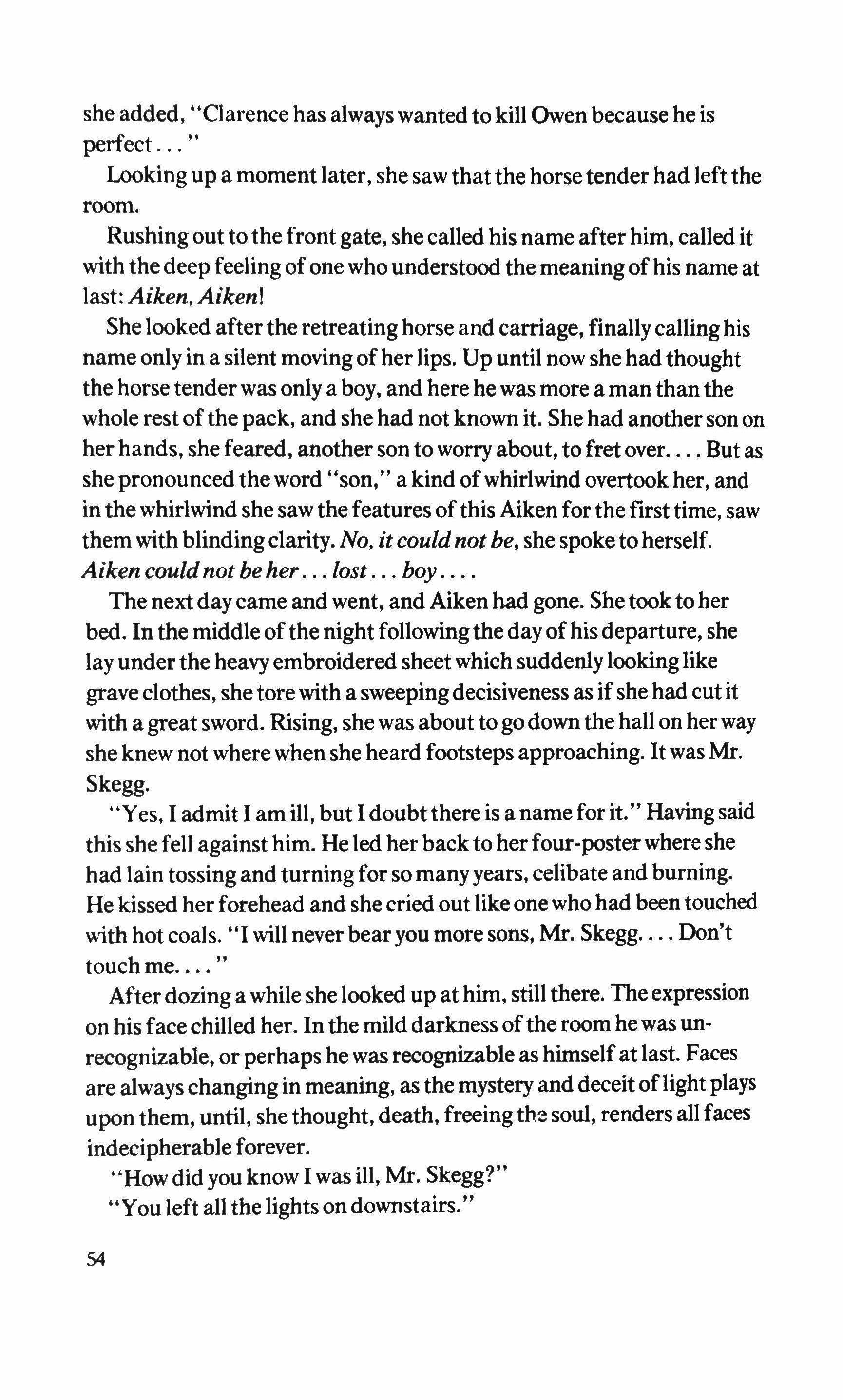
she added, "Clarence has always wanted to kill Owen because he is perfect
Looking up a moment later, she saw that the horse tender had left the room.
Rushing out to the front gate, she called his name after him, called it with the deepfeeling of one who understood the meaning ofhis name at last: Aiken, Aikenl
She looked after the retreating horse and carriage, finallycalling his name only in a silent moving ofher lips. Up until now she had thought the horse tender was only a boy, and here he was more a man than the whole rest ofthe pack, and she had not known it. She had another son on herhands, she feared. another son to worry about, to fret over But as she pronounced the word "son," a kind ofwhirlwind overtook her, and in the whirlwind she saw the features ofthis Aiken forthe firsttime, saw them with blindingclarity. No. it couldnot be, she spoke to herself. Aiken could not beher lost boy
The next day came and went, and Aiken had gone. Shetook to her bed. In the middle ofthe nightfollowingthe dayofhisdeparture, she lay underthe heavyembroidered sheet which suddenlylookinglike grave clothes, she tore with a sweepingdecisiveness as ifshe had cut it with a great sword. Rising, she was about to godown the hall on herway she knew not wherewhen she heard footstepsapproaching. It was Mr. Skegg.
"Yes, I admit 1 am ill, but I doubtthere is a name forit." Having said this she fell against him. He led herback to her four-poster where she had lain tossing and turningfor so many years, celibate and burning. He kissed her forehead and she cried out like one who had been touched with hot coals. "I will never bearyou more sons, Mr. Skegg Don't touch me "
Afterdozing a while she looked up at him, still there. The expression on his face chilled her. In the mild darkness ofthe room he was unrecognizable, or perhaps he was recognizable as himselfat last. Faces are alwayschanging in meaning, as the mystery and deceitoflightplays upon them, until, shethought, death, freeingthe soul, renders all faces indecipherable forever.
"Howdid you know 1 was ill, Mr. Skegg?" You left all the lights on downstairs."
54
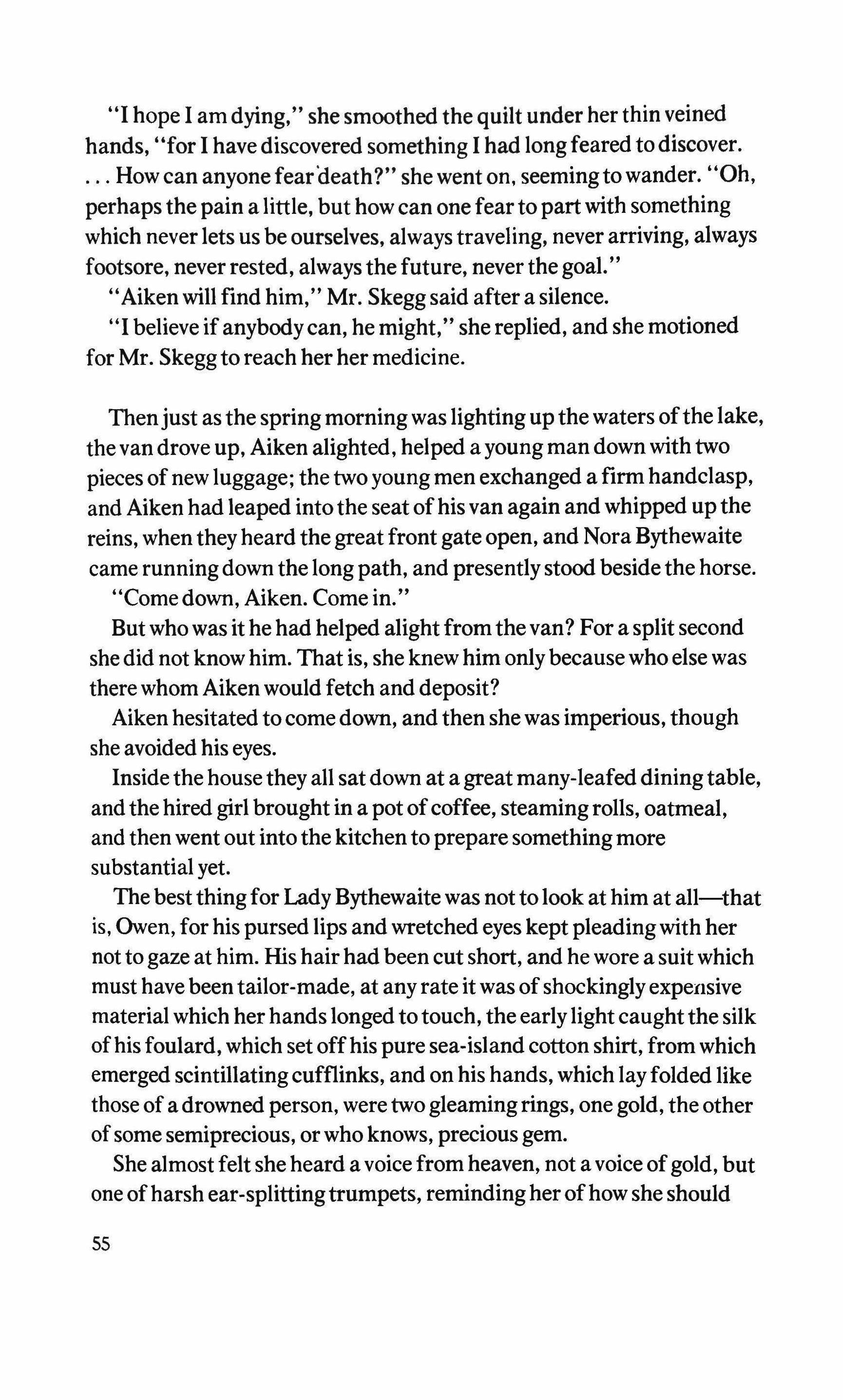
"I hope I am dying," she smoothed the quilt under her thin veined hands, "for I have discovered something I had longfeared to discover How can anyone fear'death?" she went on, seemingto wander. "Oh, perhaps the pain a little, but how can one fear to part with something which never lets us be ourselves, alwaystraveling, never arriving, always footsore, never rested, always the future, never the goal."
" Aiken will find him," Mr. Skegg said after a silence.
"I believe if anybody can, he might," she replied, and she motioned for Mr. Skegg to reach her her medicine.
Thenjust as the springmorning was lighting up the waters ofthe lake, the van drove up, Aiken alighted, helped a young man down with two pieces of new luggage; the two young men exchanged a firm handclasp, and Aiken had leaped intothe seat ofhis van again and whipped up the reins, when they heard thegreat front gate open, and Nora Bythewaite came runningdown the longpath, and presentlystood besidethe horse.
"Come down, Aiken. Come in."
But who was it he had helped alight from thevan? For a split second she did not knowhim. That is, she knew him onlybecausewho else was there whom Aiken would fetch and deposit?
Aiken hesitated to come down, and then she was imperious, though she avoided his eyes.
Inside the house they all sat down at a greatmany-leafeddiningtable, and the hired girl brought in a pot ofcoffee, steamingrolls, oatmeal, and then went out into the kitchen to prepare something more substantial yet.
The best thing for LadyBythewaite was not to look at him at all-that is, Owen, for his pursed lips and wretched eyes keptpleadingwith her not to gaze at him. His hair had been cut short, and he wore a suit which must have beentailor-made, at any rate it was of shockinglyexpensive material which her hands longed to touch, the earlylightcaught the silk ofhis foulard, which set offhis pure sea-island cotton shirt, from which emerged scintillatingcufflinks, and on his hands, which layfolded like those of a drowned person, were two gleamingrings, one gold, the other of some semiprecious, or who knows, precious gem.
She almost felt she heard a voice from heaven, not a voice ofgold, but one ofharsh ear-splittingtrumpets, remindingherofhow she should
ss
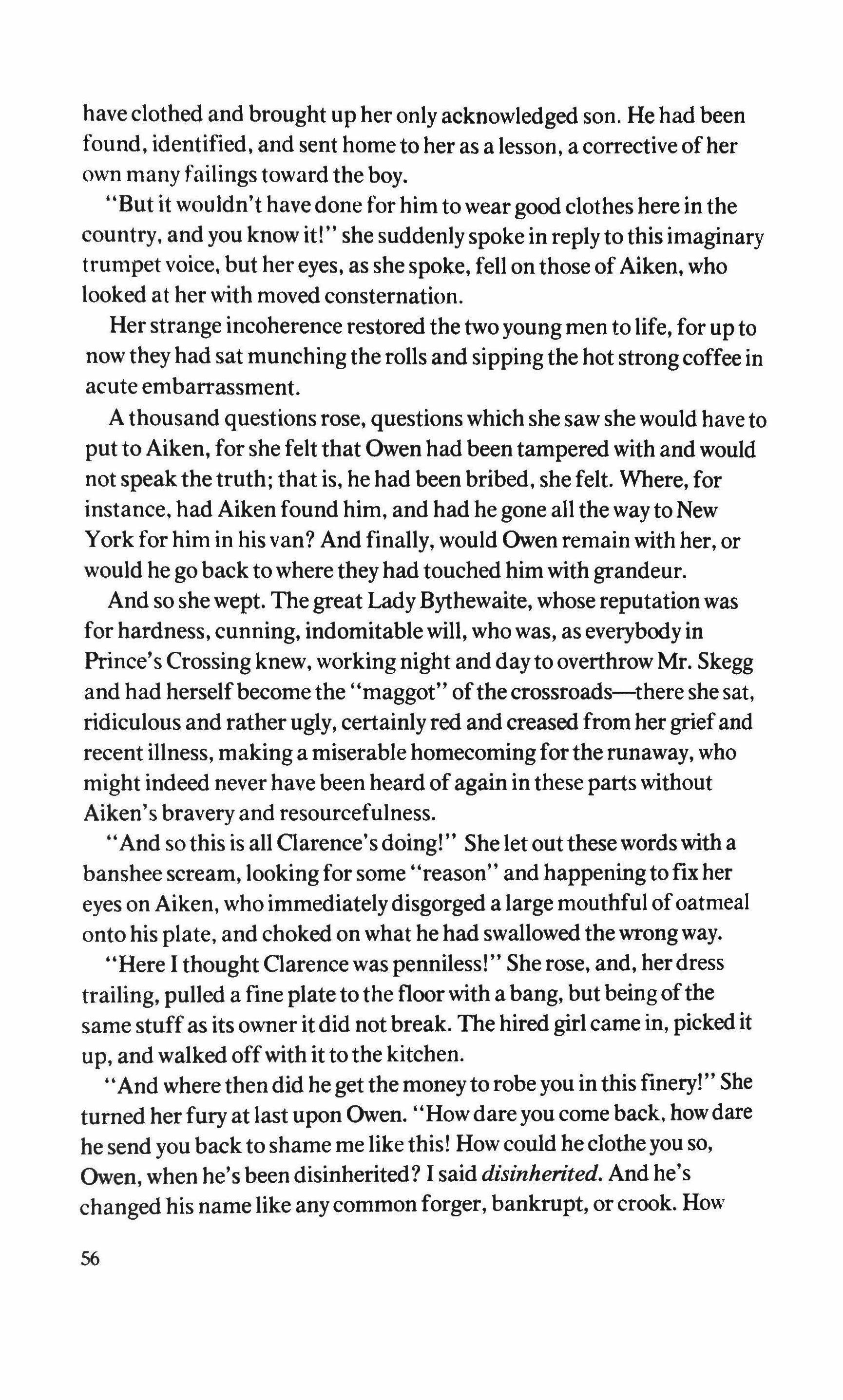
have clothed and brought up her onlyacknowledged son. He had been found, identified, and sent home to her as a lesson, a corrective of her own many failings toward the boy.
"But it wouldn't have done for him to wear good clothes here in the country, and you know it!" she suddenlyspoke in reply to this imaginary trumpet voice, but her eyes, as she spoke, fell on those ofAiken, who looked at her with moved consternation.
Her strange incoherence restored the two young men to life, for up to now they had sat munching the rolls and sipping the hot strong coffee in acute embarrassment.
A thousand questions rose, questions which she saw she would have to put to Aiken, for she felt that Owen had been tampered with and would not speakthe truth; that is, he had been bribed, she felt. Where, for instance. had Aiken found him, and had he gone all the way to New York for him in his van? And finally, would Owen remain with her, or would he go back to where they had touched him with grandeur.
And so she wept. The great LadyBythewaite, whose reputation was for hardness, cunning, indomitable will, who was, as everybody in Prince's Crossing knew, workingnight and day to overthrow Mr. Skegg and had herselfbecome the "maggot" ofthe crossroads-there she sat, ridiculous and rather ugly, certainly red and creased from her griefand recent illness, making a miserable homecomingforthe runaway, who might indeed never have been heard of again in these parts without Aiken's bravery and resourcefulness.
"And so this is all Clarence's doing!" She let out these words with a banshee scream, looking for some "reason" and happeningto fix her eyes on Aiken, who immediatelydisgorged a large mouthful ofoatmeal onto his plate, and choked on what he had swallowed the wrongway.
"Here I thought Clarence was penniless!" She rose, and, her dress trailing, pulled a fine plate to the floorwith a bang, but being ofthe same stuff as its owner it did not break. The hired girl came in, picked it up, and walked offwith it to the kitchen.
"And where then did he get the money to robe you in this finery!" She turned herfury at last upon Owen. "Howdare you come back. howdare he send you back to shame me like this! How could he clothe you so, Owen, when he's been disinherited? I said disinherited. And he's changed his name like any common forger, bankrupt, or crook. How
56
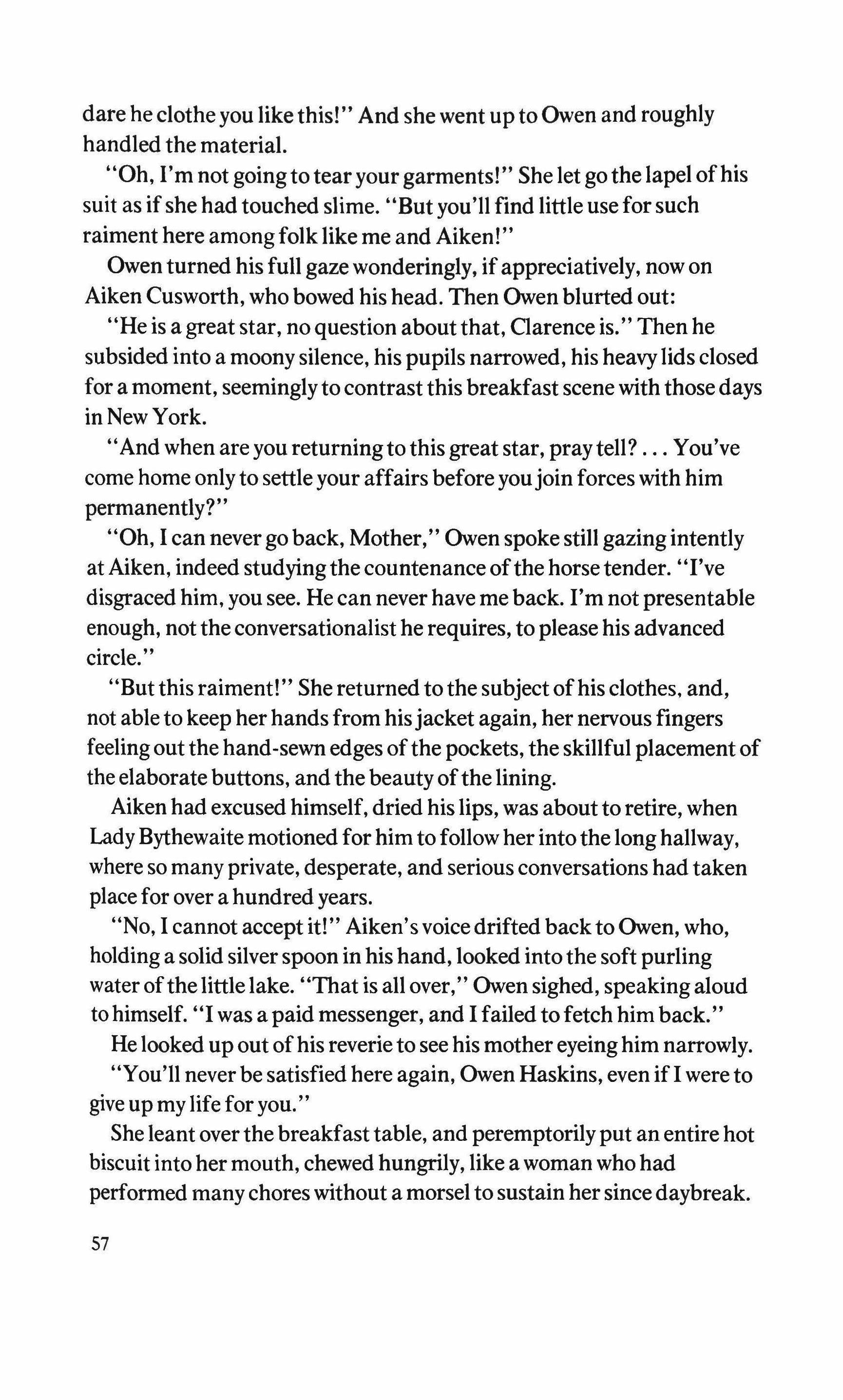
dare he clothe you like this!" And she went up to Owen and roughly handled the material.
"Oh, I'm not going to tear your garments!" She let go the lapel ofhis suit as if she had touched slime. "But you'll find little use for such raiment here among folk like me and Aiken!"
Owen turned his full gaze wonderingly, ifappreciatively, now on Aiken Cusworth, who bowed his head. Then Owen blurted out:
"He is a great star, no question about that, Oarence is." Then he subsided into a moony silence, his pupils narrowed, his heavylids closed for a moment, seemingly to contrast this breakfast scene with those days in New York.
"And when are you returningto this great star, pray tell? You've come home only to settle your affairs before youjoin forces with him permanently?"
"Oh, I can never go back, Mother," Owen spoke still gazingintently at Aiken, indeed studyingthe countenance ofthe horsetender. "I've disgraced him, you see. He can never have me back. I'm not presentable enough, not the conversationalist he requires, to please his advanced circle."
"But this raiment!" She returned to the subject ofhis clothes, and, not able to keep her hands from hisjacketagain, her nervous fingers feeling out the hand-sewn edges ofthe pockets, the skillful placementof the elaborate buttons, and the beautyofthe lining.
Aiken had excused himself, dried his lips, was about to retire, when LadyBythewaite motioned for him to follow her intothe longhallway, where so many private, desperate, and serious conversations had taken place for over a hundred years.
"No, I cannot accept it!" Aiken's voice drifted back to Owen, who, holding a solid silver spoon in his hand, looked intothe soft purling water ofthelittlelake. "That is all over," Owen sighed, speaking aloud to himself. "I was a paid messenger, and I failed to fetch him back."
He looked up out ofhis reverie to see his mother eyeing him narrowly.
"You'll never be satisfied here again, Owen Haskins, even if I were to give up my life foryou."
She leant over the breakfast table, and peremptorilyput an entire hot biscuit into her mouth, chewed hungrily, like a woman who had performed many chores without a morsel to sustain her sincedaybreak.
57
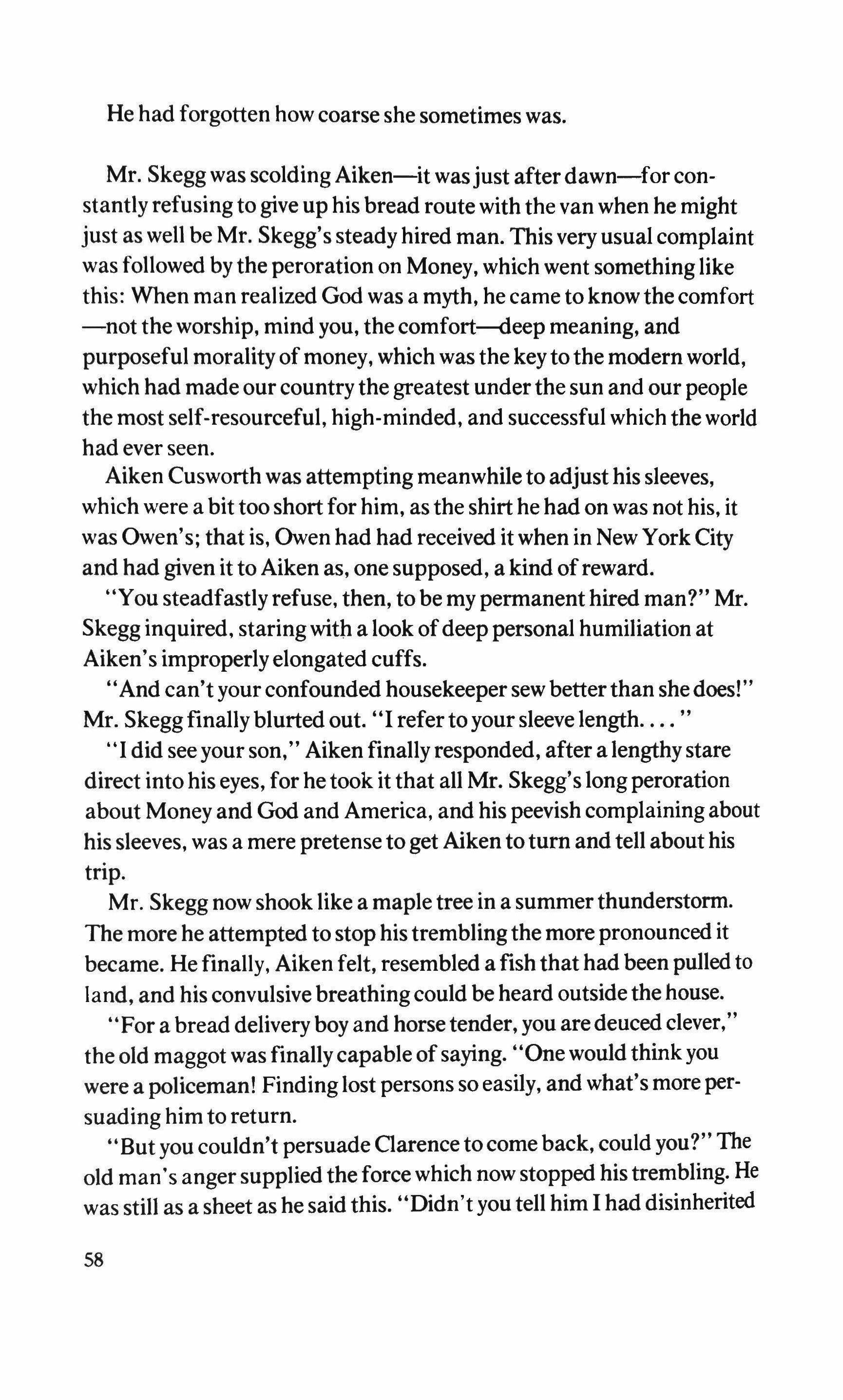
He had forgotten how coarse she sometimes was.
Mr. Skegg was scolding Aiken-it was just after dawn-for constantlyrefusing to give up his bread route with the van when he might just as well be Mr. Skegg'ssteady hired man. This very usual complaint was followed bythe peroration on Money, which went something like this: When man realized God was a myth, he came to know the comfort -not the worship, mind you, the comfort-deepmeaning, and purposeful morality of money, which was the key to the modern world, which had made our country the greatest underthe sun and our people the most self-resourceful, high-minded, and successful which the world had ever seen.
Aiken Cusworth was attempting meanwhile to adjust his sleeves, which were a bit too short for him, as the shirt he had on was not his, it was Owen's; that is, Owen had had received itwhen in New York City and had given it to Aiken as, one supposed, a kind ofreward.
"You steadfastlyrefuse, then, to be my permanent hired man?" Mr. Skegginquired, staringwith a look ofdeeppersonal humiliation at Aiken's improperlyelongated cuffs.
" And can't your confounded housekeeper sew better than shedoes!" Mr. Skeggfinallyblurted out. "I refer to your sleeve length
.• I did see your son," Aiken finallyresponded, after a lengthy stare direct into his eyes, for he took it that all Mr. Skegg'slongperoration about Money and God and America, and his peevishcomplaining about his sleeves, was a mere pretense to get Aiken to turn and tell about his trip.
Mr. Skegg now shook like a maple tree in a summer thunderstorm. The more he attempted to stop his tremblingthe more pronounced it became. He finally, Aiken felt, resembled a fish that had been pulled to land, and his convulsive breathing could be heard outside the house For a bread deliveryboy and horse tender, you are deuced clever," the old maggot was finallycapable of saying. "One would think you were a policeman! Finding lost persons so easily, and what's more persuading him to return.
"But you couldn't persuade Clarence to come back, could you?" The old man's anger supplied the force which now stopped his trembling. He was stilI as a sheet as he said this. "Didn't you tell him I had disinherited
58
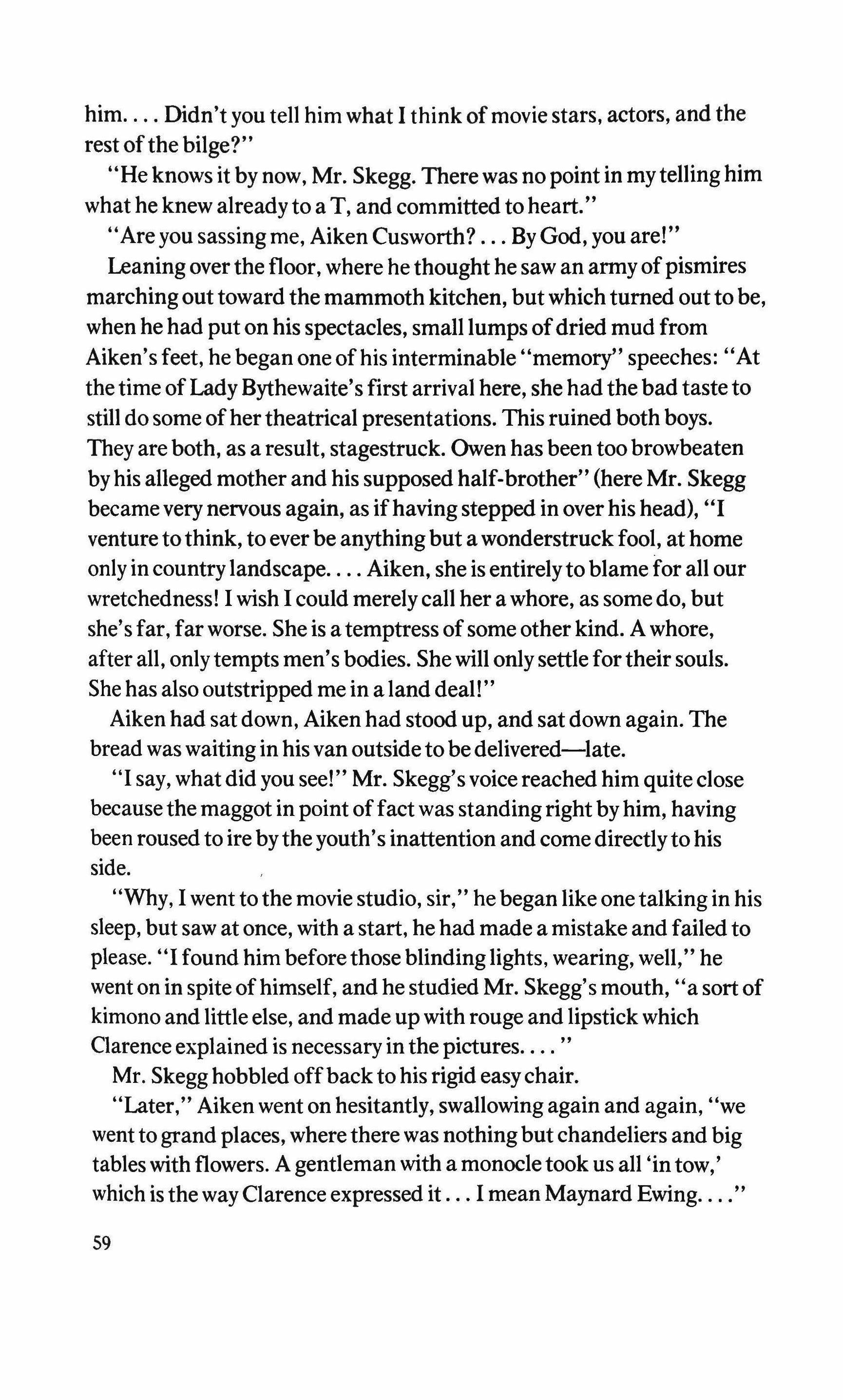
him Didn't you tell him what 1 think ofmovie stars, actors, and the rest ofthe bilge?"
"He knows it by now, Mr. Skegg. There was no point in my telling him what he knew already to a T, and committed to heart."
"Are you sassing me, Aiken Cusworth? ByGod, you are!"
Leaning over the floor, where he thought he saw an armyofpismires marching out toward the mammoth kitchen, but which turned out to be, when he had put on his spectacles, small lumps ofdried mud from Aiken's feet, he began one of his interminable "memory" speeches: "At thetime ofLadyBythewaite's first arrival here, she had the bad taste to still do some ofhertheatrical presentations. This ruined both boys. They are both, as a result, stagestruck. Owen has been too browbeaten by his alleged mother and his supposed half-brother" (here Mr. Skegg became very nervous again, as ifhavingstepped in over his head), "I venture tothink, to ever be anythingbut a wonderstruck fool, at home only in countrylandscape Aiken, she is entirelyto blame for all our wretchedness! 1 wish I could merelycall her a whore, as some do, but she's far, far worse. She is a temptress of some other kind. A whore, after all, onlytempts men's bodies. She will onlysettle fortheir souls. She has also outstripped me in a land deal!"
Aiken had sat down, Aiken had stood up, and sat down again. The bread was waiting in his van outside to bedelivered-late.
"I say, what did you see!" Mr. Skegg's voice reached him quite close becausethe maggot in point offact was standingrightbyhim, having been roused to ire bytheyouth's inattention and come directlyto his side.
"Why, 1 went to the movie studio, sir," he began like one talking in his sleep, but saw at once, with a start, he had made a mistake and failed to please. "I found him before those blindinglights, wearing, well," he went on in spite ofhimself, and he studied Mr. Skegg's mouth, "a sort of kimono and little else, and made up with rouge and lipstick which Clarence explained is necessary in the pictures
Mr. Skegg hobbled offback to his rigid easychair.
"Later," Aiken went on hesitantly, swallowingagain and again, "we went to grandplaces, wherethere was nothingbut chandeliers and big tables with flowers. A gentleman with a monocletook us all 'intow,' which is the way Clarence expressed it. I mean Maynard Ewing "
S9
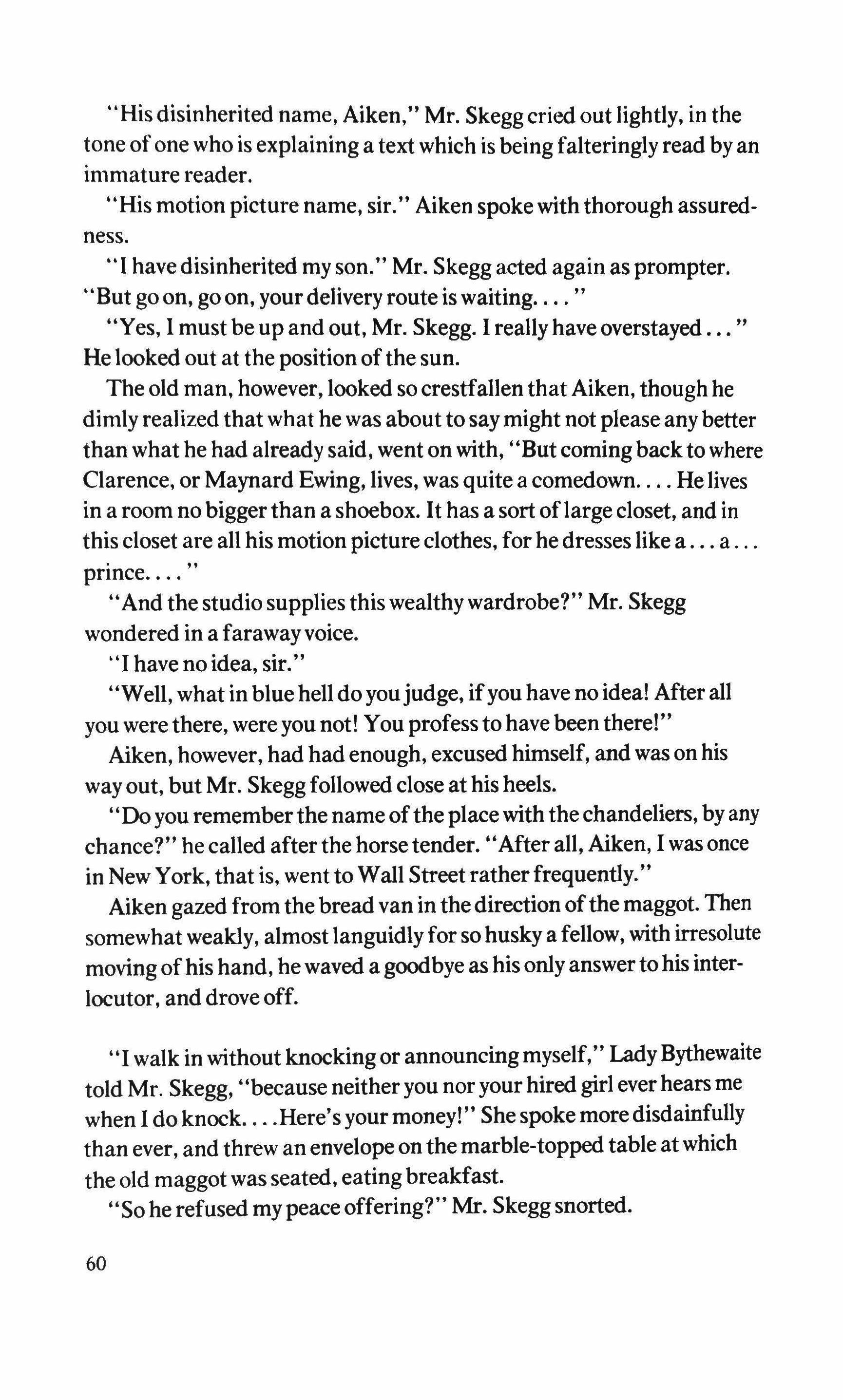
"His disinherited name, Aiken," Mr. Skegg cried out lightly, in the tone of one who is explaining a text which is beingfalteringlyread by an immature reader.
"His motion picture name, sir." Aiken spoke with thorough assuredness.
"I have disinherited my son." Mr. Skegg acted again as prompter. "But go on, go on, yourdelivery route is waiting
"Yes, I must be up and out, Mr. Skegg. I really have overstayed " He looked out at the position ofthe sun.
The old man, however, looked so crestfallen that Aiken, though he dimly realized that what he was about to say might not please any better than what he had alreadysaid, went on with, "But coming back to where Clarence, or Maynard Ewing, lives, was quite a comedown He lives in a room no biggerthan a shoebox. It has a sort oflargecloset, and in this closet are all his motion picture clothes, for he dresses like a a prince
"And the studio supplies this wealthywardrobe?" Mr. Skegg wondered in a farawayvoice
I have no idea, sir."
"Well, what in blue hell do youjudge, ifyou have no idea! After all you were there, were you not! You profess to have been there!"
Aiken, however, had had enough, excused himself, and was on his way out, but Mr. Skegg followed close at his heels
Doyou rememberthe name ofthe placewith the chandeliers, by any chance?" he called after the horsetender. "After all, Aiken, I was once in New York, that is. went to Wall Street ratherfrequently."
Aiken gazed from the bread van in thedirection ofthe maggot. Then somewhat weakly, almost languidly for so husky a fellow, with irresolute moving ofhis hand, he waved a goodbye as his only answer to his interlocutor, and drove off
I walk in without knocking or announcingmyself," LadyBythewaite told Mr. Skegg, "because neither you nor your hired girl ever hears me when I do knock Here's your money!" She spoke more disdainfully than ever, and threw an envelope on the marble-topped table at which the old maggot was seated, eatingbreakfast.
"So he refused my peace offering?" Mr. Skeggsnorted.
60
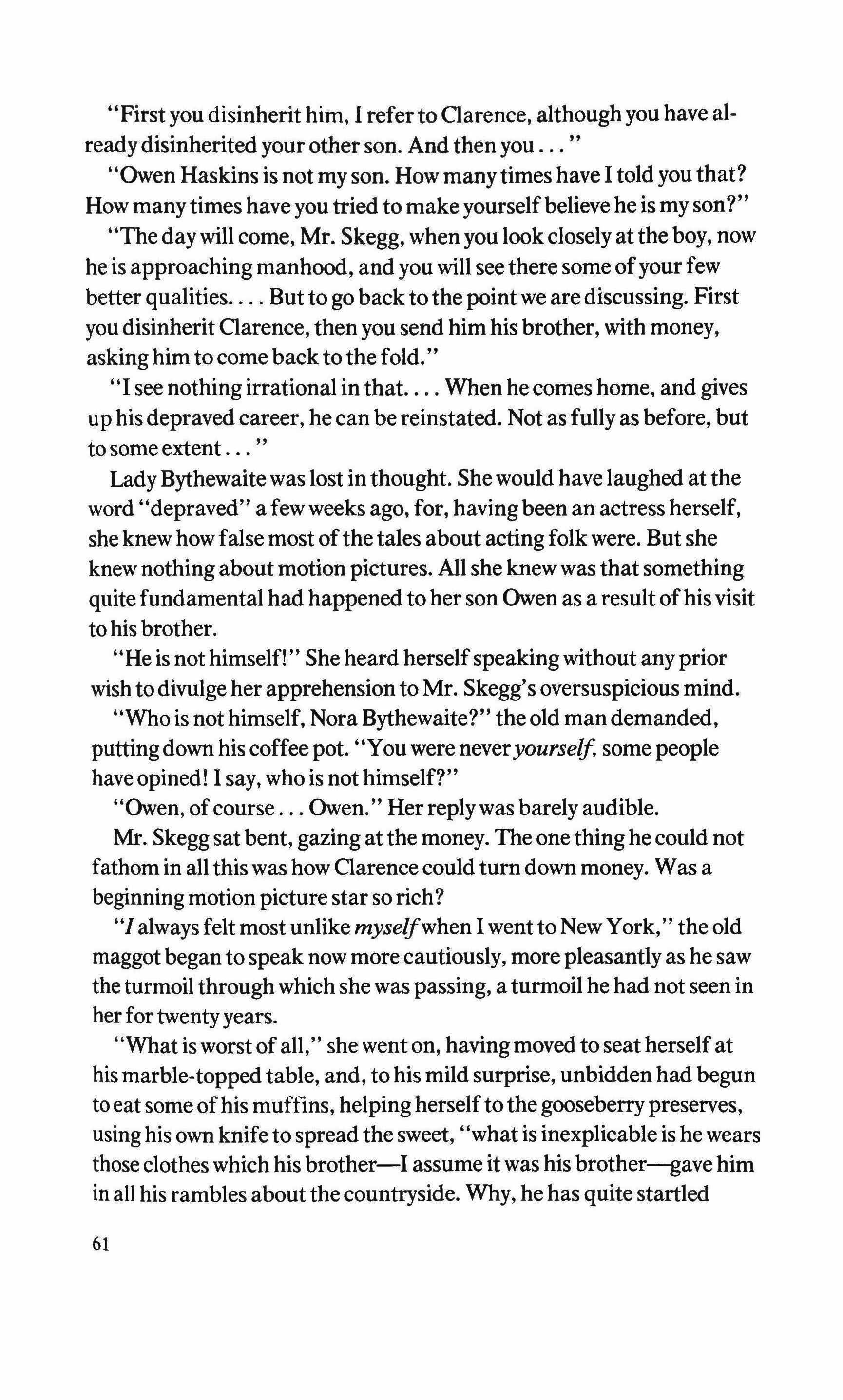
"First you disinherit him, I refer to Clarence, although you have alreadydisinherited your other son. And then you
"Owen Haskins is not my son. How many times have I told you that? How many times have you tried to make yourselfbelieve he is my son?"
"The day will come, Mr. Skegg, when you look closely at the boy, now he is approaching manhood, and you will see there some ofyour few better qualities But to go back to the point we are discussing. First you disinherit Clarence, then you send him his brother, with money, asking him to come back to the fold."
"I see nothing irrational in that. When he comes home, and gives up his depraved career, he can be reinstated. Not as fully as before, but to some extent.
LadyBythewaite was lost in thought. She would have laughed at the word" depraved" a fewweeks ago, for, havingbeen an actress herself, she knew how false most ofthe tales about acting folk were. But she knew nothing about motion pictures. All she knew was that something quitefundamental had happened to her son Owen as a result ofhis visit to his brother.
"He is not himself!" She heard herselfspeakingwithout any prior wish to divulge her apprehension to Mr. Skegg'soversuspicious mind.
"Who is not himself, Nora Bythewaite?" the old man demanded, puttingdown his coffee pot. "You were neveryourself, some people have opined! I say, who is not himself?"
"Owen, of course Owen." Her reply was barely audible.
Mr. Skegg sat bent, gazing at the money. The one thing he could not fathom in all this was how Clarencecould turn down money. Was a beginning motion picture star so rich?
"I always felt most unlike myselfwhen I went to New York," the old maggotbegan to speak now more cautiously, more pleasantly as he saw the turmoil through which she was passing, a turmoil he had not seen in herfortwentyyears.
"What is worst of all," she went on, havingmoved to seat herself at his marble-toppedtable, and, to his mild surprise, unbidden had begun to eat some ofhis muffins, helping herselfto the gooseberry preserves, using his own knife to spread the sweet, "what is inexplicable is he wears those clothes which his brother-I assume it was his brother-gave him in all his rambles aboutthecountryside. Why, he has quite startled
61
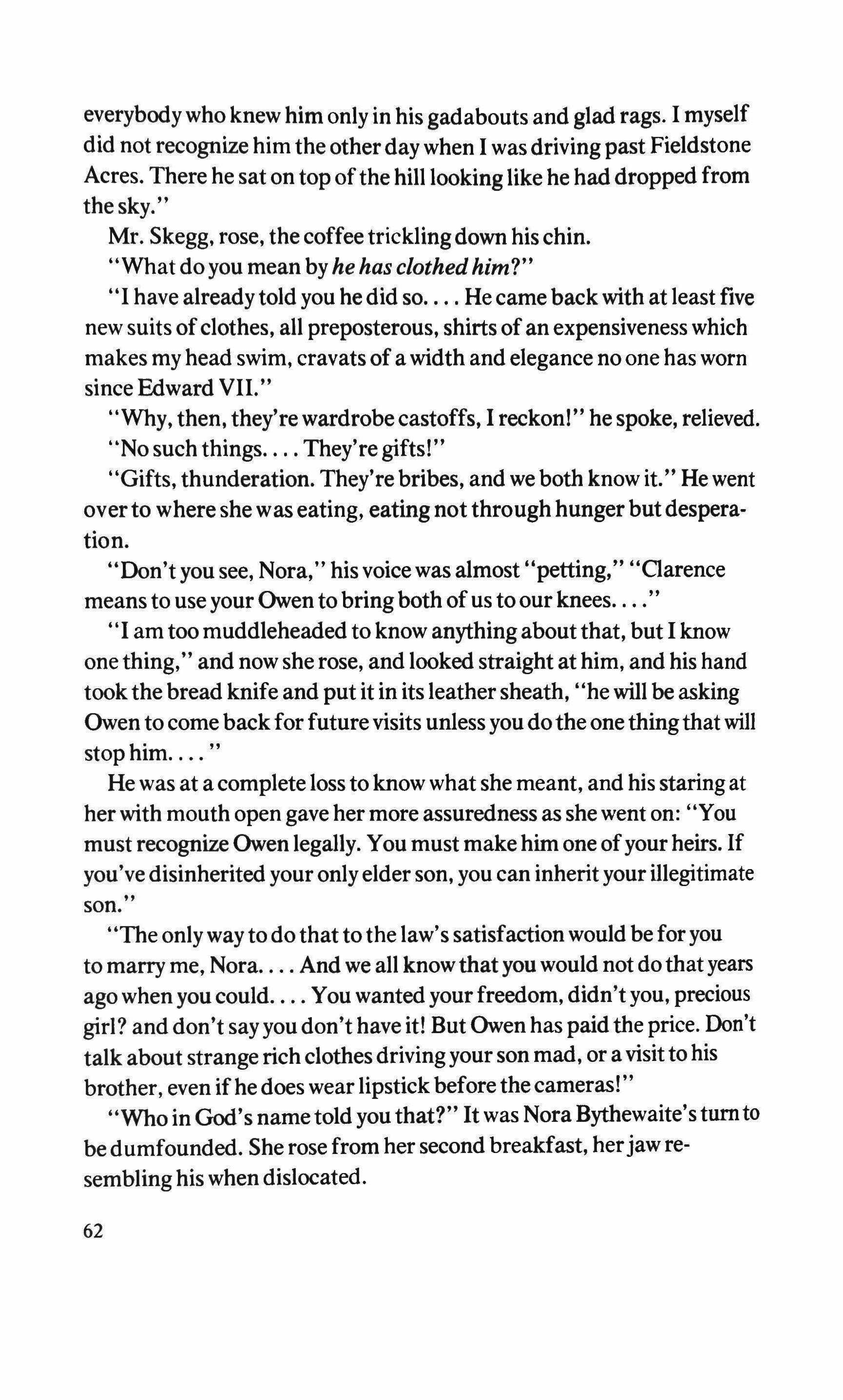
everybodywho knew him only in his gadabouts and glad rags. I myself did not recognize him the other day when I was drivingpast Fieldstone Acres. There he sat on top ofthe hill looking like he had dropped from the sky."
Mr. Skegg, rose, the coffee tricklingdown his chin.
"What do you mean by he has clothed him?"
"I have alreadytold you he did so He came backwith at least five new suits ofclothes, all preposterous, shirts of an expensiveness which makes my head swim, cravats of a width and elegance no one has worn since Edward VII."
"Why, then, they're wardrobe castoffs, I reckon!" he spoke, relieved.
"No such things They'regifts!"
"Gifts, thunderation. They'rebribes, and we both know it." He went over to where she was eating, eating not throughhunger butdesperation.
"Don't you see, Nora," his voice was almost "petting," "Clarence means to use your Owen to bring both of us to our knees
"I am too muddleheaded to know anythingaboutthat, but I know one thing," and now she rose, and looked straight at him, and his hand tookthe bread knife and put it in its leather sheath, "he will be asking Owen to come backfor future visits unless you dothe one thingthat will stop him
He was at a complete loss to know what she meant, and his staring at herwith mouth open gave her more assuredness as she went on: "You must recognize Owen legally. You must make him one ofyour heirs. If you've disinherited your onlyelder son, you can inherit your illegitimate son."
"The only way to do that to the law's satisfaction would be for you to marry me, Nora And we all knowthat you would not do that years ago when you could You wanted your freedom, didn't you, precious girl? and don't sayyou don't have it! But Owen has paid the price. Don't talk about strange rich clothes driving your son mad, or a visit to his brother, even ifhe does wear lipstick before thecameras!"
"Who in God's name told you that?" It was Nora Bythewaite's turnto be dumfounded. She rose from her second breakfast, herjaw resembling his when dislocated.
62
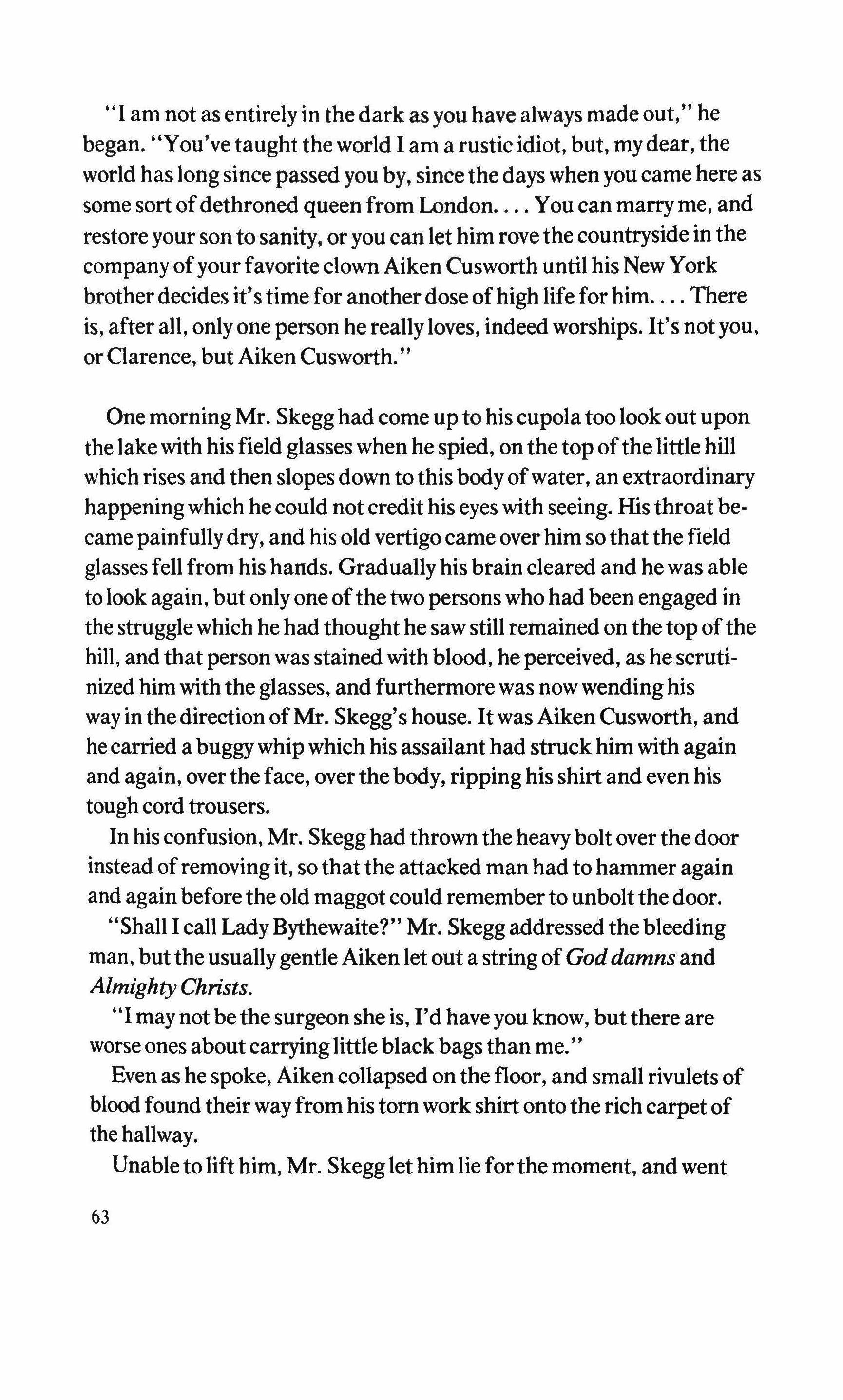
"I am not as entirely in the dark as you have always made out," he began. "You've taught the world I am a rustic idiot, but, my dear, the world has long since passed you by, since the days when you came here as some sort ofdethroned queen from London You can marry me, and restore your son to sanity, or you can let him rove the countryside in the company ofyourfavorite clown Aiken Cusworth until his New York brother decides it's time for anotherdose ofhigh life for him There is, after all, only one person he reallyloves, indeed worships. It's not you, or Clarence, but Aiken Cusworth."
One morning Mr. Skegg had come up to his cupola too look out upon the lake with his field glasses when he spied, on the top ofthe little hill which rises and then slopes down to this body ofwater, an extraordinary happeningwhich hecould not credit his eyes with seeing. His throat became painfullydry, and his old vertigo came over him so that the field glasses fell from his hands. Graduallyhis brain cleared and he was able to look again, but only one ofthe two persons who had been engaged in the strugglewhich he had thought he saw still remained on the top ofthe hill, and that person was stained with blood, he perceived, as he scrutinized him with the glasses, and furthermore was now wending his way in the direction ofMr. Skegg's house. It was Aiken Cusworth, and he carried a buggywhip which his assailant had struck him with again and again, over the face, over thebody, ripping his shirt and even his tough cord trousers.
In his confusion, Mr. Skegghad thrown the heavybolt over the door instead ofremovingit, so that the attacked man had to hammer again and again before the old maggot could remember to unboltthe door.
"Shall I call LadyBythewaite?" Mr. Skegg addressed the bleeding man, but the usuallygentle Aiken let out a string of Goddamns and Almighty Christs.
"I may not be the surgeon she is, I'd have you know, butthere are worse ones about carryinglittle black bags than me."
Even as he spoke, Aiken collapsed on the floor, and small rivulets of blood found their way from his torn work shirt onto the rich carpet of the hallway.
Unable to lift him, Mr. Skegglet him lie forthe moment, and went
63
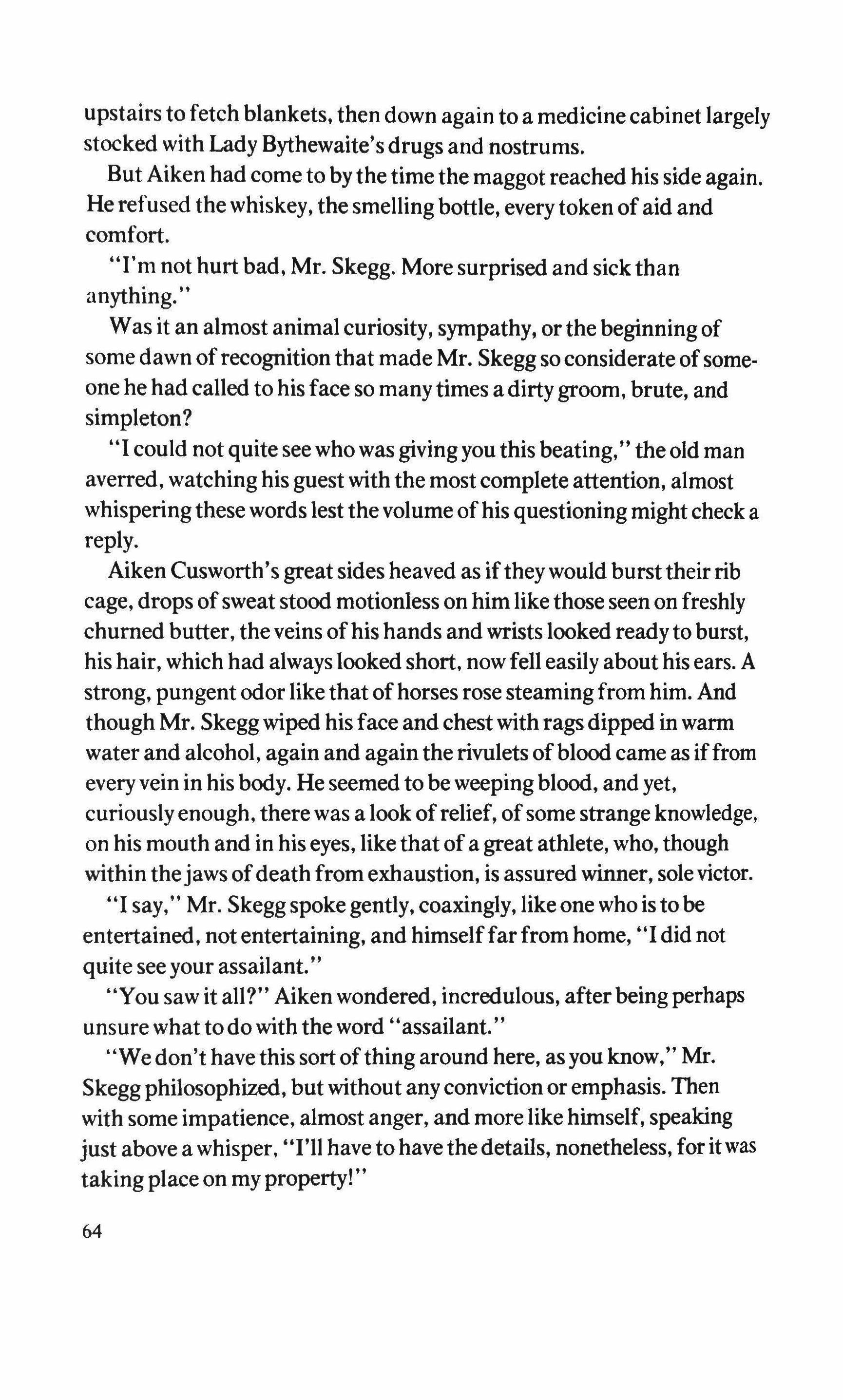
upstairs to fetch blankets, then down again to a medicine cabinet largely stocked with Lady Bythewaite'sdrugs and nostrums.
But Aiken had come to bythe time the maggot reached his side again. He refused the whiskey, the smellingbottle, every token ofaid and comfort.
"I'm not hurt bad, Mr. Skegg. More surprised and sick than anything."
Was it an almost animal curiosity, sympathy, or the beginning of some dawn ofrecognition that made Mr. Skegg so considerate of someone he had called to his face so many times a dirty groom, brute, and simpleton?
"I could not quite see who was giving you this beating," the old man averred, watching his guest with the most complete attention, almost whisperingthese words lest the volume ofhis questioningmight check a reply.
Aiken Cusworth's great sides heaved as ifthey would bursttheir rib cage, drops ofsweat stood motionless on him like those seen on freshly churned butter, the veins ofhis hands and wrists looked ready to burst, his hair, which had always looked short, now fell easily about his ears. A strong, pungent odor like that of horses rose steaming from him. And though Mr. Skeggwiped his face and chest with rags dipped in warm water and alcohol, again and againthe rivulets ofblood came as iffrom every vein in his body. He seemed to be weepingblood, and yet, curiouslyenough, there was a look ofrelief, of some strange knowledge, on his mouth and in his eyes, likethat of a great athlete, who, though within thejaws ofdeath from exhaustion, is assured winner, solevictor.
"I say," Mr. Skeggspokegently, coaxingly, like one who is to be entertained, not entertaining, and himselffarfrom home, "I did not quite see your assailant."
"You saw it all?" Aiken wondered, incredulous, afterbeingperhaps unsure whatto do with the word"assailant."
"We don't havethis sort ofthing around here, as you know," Mr. Skeggphilosophized, but without any conviction or emphasis. Then with some impatience, almost anger, and more like himself, speaking just above a whisper, "I'll have to have thedetails, nonetheless, forit was takingplace on my property!"
64
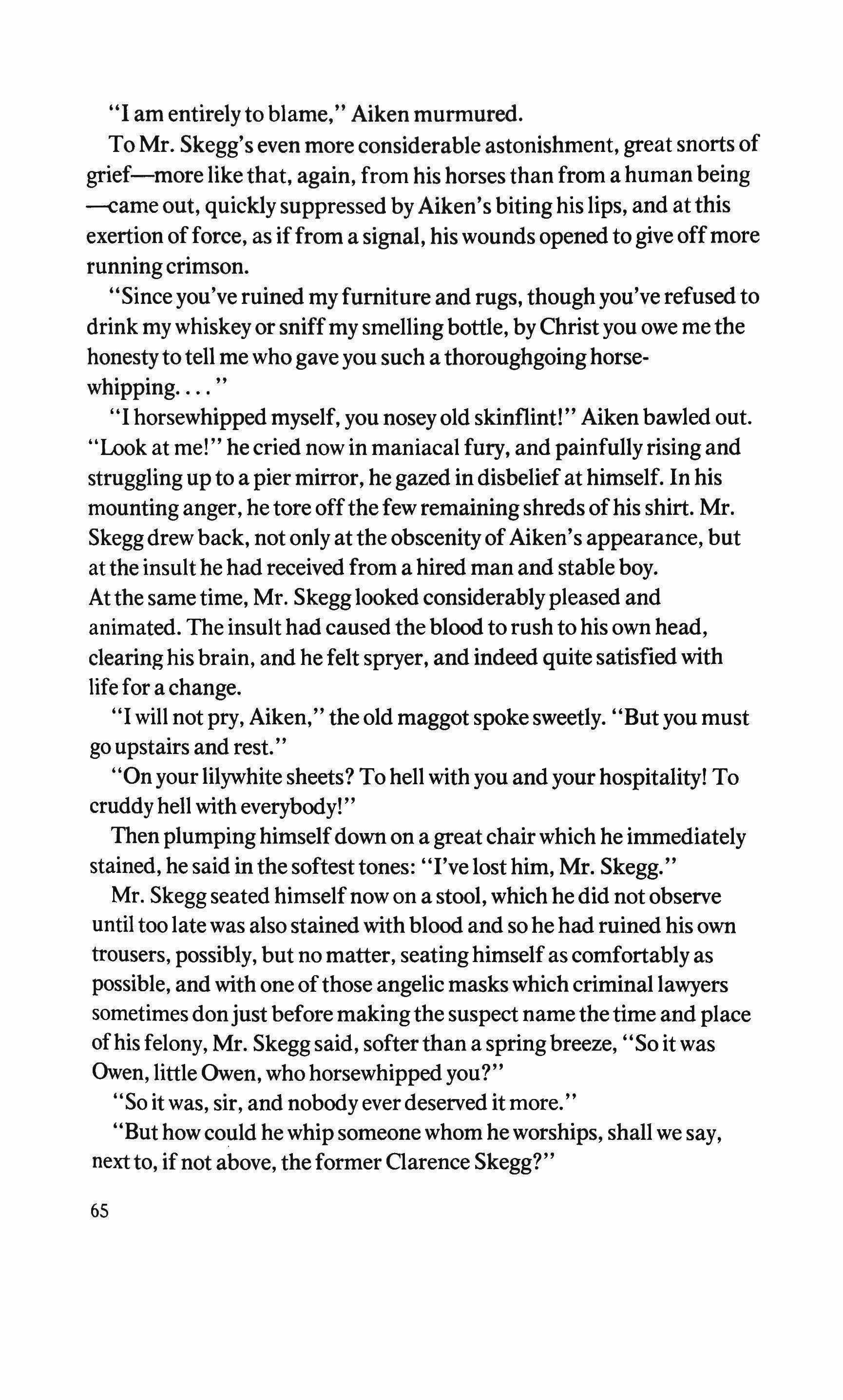
"I am entirely to blame," Aiken murmured.
To Mr. Skegg's even more considerable astonishment, great snorts of grief-more like that, again, from his horses than from a human being �ame out, quicklysuppressed byAiken's biting his lips, and at this exertion offorce, as iffrom a signal, his wounds opened to give off more runningcrimson.
"Since you've ruined my furniture and rugs, thoughyou've refused to drink my whiskey or sniffmy smellingbottle, by Christ you owe me the honesty to tell me whogave you such a thoroughgoinghorsewhipping
I horsewhippedmyself, you nosey old skinflint!" Aiken bawled out. "Look at me!" he cried now in maniacal fury, and painfullyrising and struggling up to a piermirror, he gazed in disbelief at himself. In his mounting anger, he tore offthefew remaining shreds ofhis shirt. Mr. Skegg drew back, not only at the obscenityofAiken's appearance, but at the insult he had received from a hired man and stable boy. Atthe same time, Mr. Skegg looked considerablypleased and animated. The insult had caused the blood to rush to his own head, clearinghis brain, and he felt spryer, and indeed quite satisfied with life for a change.
"I will not pry, Aiken," the old maggot spokesweetly. "But you must go upstairs and rest."
"On your lilywhite sheets? To hell with you and your hospitality! To cruddy hell with everybody!"
Then plumping himselfdown on a great chairwhich he immediately stained, he said inthe softest tones: "I'velost him, Mr. Skegg."
Mr. Skegg seated himself now on a stool, which he did not observe until too late was also stained with blood and so he had ruined his own trousers, possibly, but no matter, seating himself as comfortably as possible, and with one ofthose angelic masks which criminal lawyers sometimes donjust before makingthe suspect name thetime and place ofhis felony, Mr. Skeggsaid, softerthan a springbreeze, "So it was Owen, little Owen, who horsewhippedyou?"
"So it was, sir, and nobody ever deserved it more."
"But how could he whip someone whom heworships, shall we say, next to, if not above, theformer Clarence Skegg?"
6S
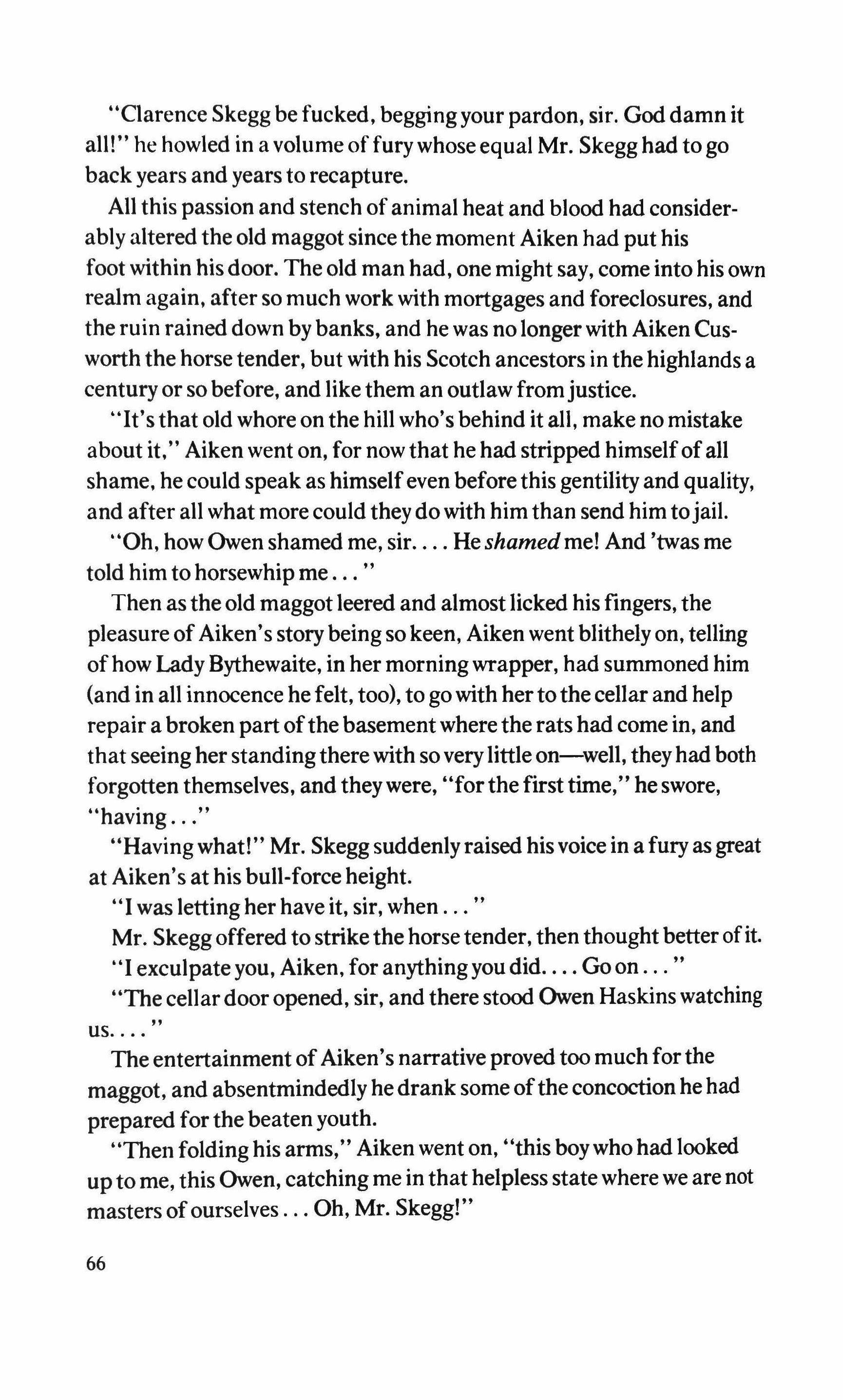
"Clarence Skegg be fucked, begging your pardon, sir. God damn it a1l!" he howled in a volume of furywhose equal Mr. Skegghad togo back years and years to recapture.
All this passion and stench of animal heat and blood had considerably altered the old maggot since the moment Aiken had put his foot within his door. The old man had, one might say, come into his own realm again, after so much work with mortgages and foreclosures, and the ruin rained down bybanks, and he was no longerwith Aiken Cusworth the horse tender, but with his Scotch ancestors in the highlands a century or so before, and like them an outlaw fromjustice.
"It's that old whore on the hill who's behind it all, make no mistake about it," Aiken went on, for now that he had stripped himselfofall shame, he could speak as himself even before this gentility and quality, and after all what more could they dowith him than send him tojail.
"Oh, how Owen shamed me, sir He shamedmel And 'twas me told him to horsewhip me
Then as the old maggot leered and almost licked his fingers, the pleasure ofAiken's storybeing so keen, Aiken went blithely on, telling ofhow Lady Bythewaite, in her morning wrapper, had summoned him (and in all innocence he felt, too), to go with her to the cellar and help repair a broken part ofthe basementwhere the rats had come in, and that seeing her standingtherewith so verylittle on-well, they had both forgotten themselves, and they were, "forthefirsttime," he swore, "having
"HavingwhatI " Mr. Skeggsuddenlyraised his voice in a fury as great at Aiken's at his bull-force height.
"I was letting her have it, sir, when Mr. Skeggoffered to strikethe horsetender, then thought better ofit.
"I exculpate you, Aiken, for anything you did Go on
"The cellar door opened, sir, and there stood Owen Haskins watching us
The entertainment ofAiken's narrative proved too much forthe maggot, and absentmindedly he drank some ofthe concoction hehad prepared for the beaten youth.
"Then folding his arms," Aiken went on, "this boywho had looked up to me, this Owen, catching me in that helpless state where we are not masters ofourselves Oh, Mr. Skeggl"
66
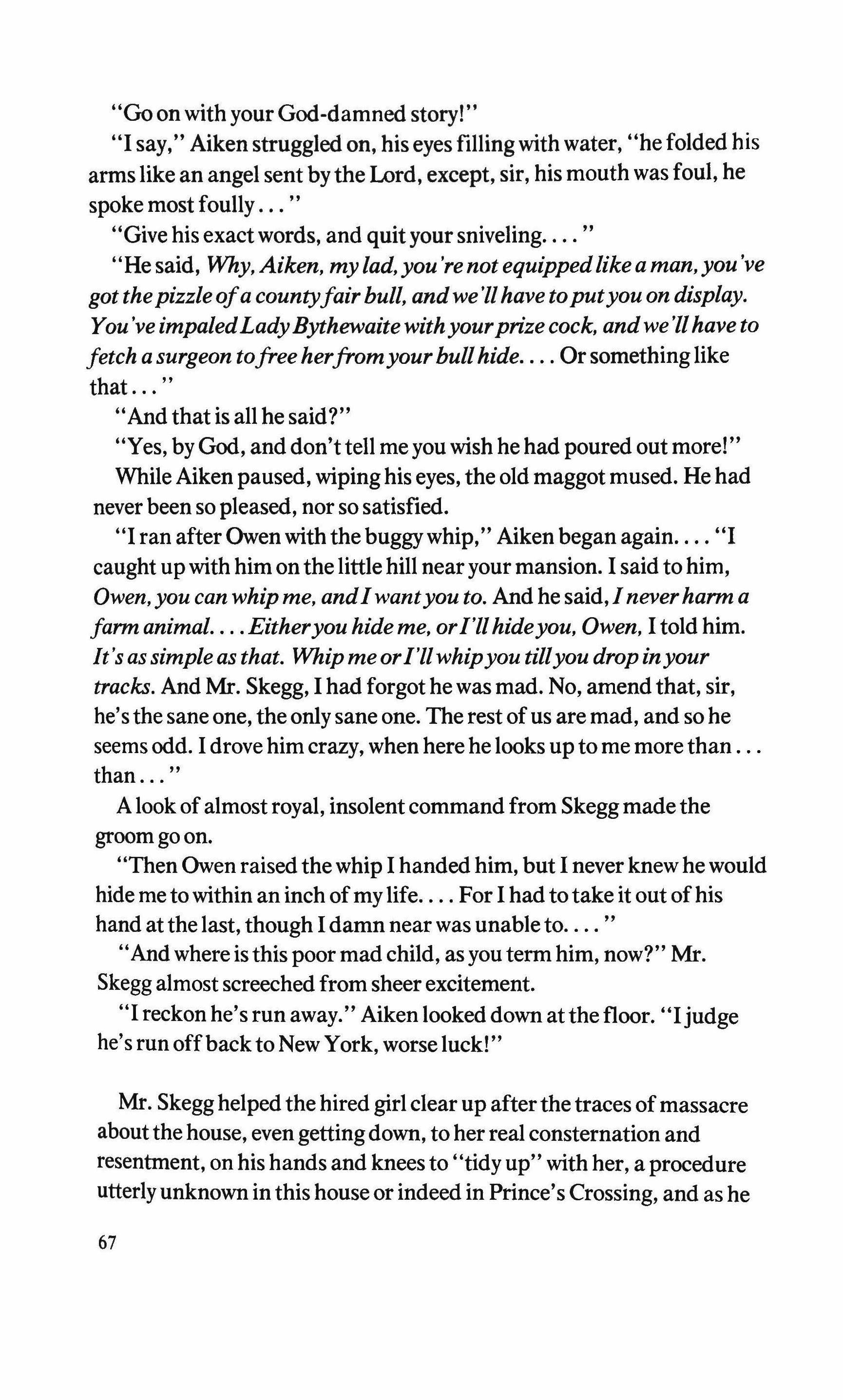
"Go on with your God-damned storyI "Isay," Aiken struggled on, his eyes fillingwith water, "he folded his arms like an angel sent bythe Lord, except, sir, his mouth was foul, he spoke most foully
"Give his exact words, and quit your sniveling......
"He said, Why, Aiken, my lad,you're not equippedlike a man, you've got thepizzleofa countyfairbull, andwe'llhave toputyou on display. You've impaledLadyBythewaitewithyourprizecock, andwe'llhave to fetch a surgeon tofreeherfromyourbullhide Orsomethinglike that.
"And that is all he said?"
"Yes, byGod, and don'ttell me you wish he had poured out morel"
While Aiken paused, wipinghis eyes, the old maggot mused. He had never been so pleased, nor so satisfied.
"I ran after Owen with the buggywhip," Aiken beganagain "I caught up with him on the little hill near your mansion. I said to him, Owen, you can whip me, andIwantyou to. And he said, I never harm a farm animal Eitheryou hide me, orI'llhideyou, Owen, I told him. It's as simple as that. Whip me orI'llwhipyou tillyou drop inyour tracks. And Mr. Skegg, I had forgot he was mad. No, amend that, sir, he'sthe sane one, the only sane one. The rest of us are mad, and so he seems odd. I drove him crazy, when here he looks up to me more than than .....
A lookof almost royal, insolent command from Skegg made the groom go on.
"Then Owen raised thewhip I handed him, but I never knew hewould hide me to within an inch ofmylife For I had to take it out ofhis hand at the last, though I damn near was unable to
"And where is this poor mad child, as you term him, now?" Mr. Skegg almost screeched from sheer excitement.
"I reckon he's run away." Aiken looked down atthefloor. "Ijudge he's run offbackto New York, worseluckl"
Mr. Skegghelped the hired girl clear up afterthe traces of massacre about the house, even gettingdown, to her real consternation and resentment, on his hands and knees to "tidyup" with her, a procedure utterly unknown in this house or indeed in Prince's Crossing, and as he
67
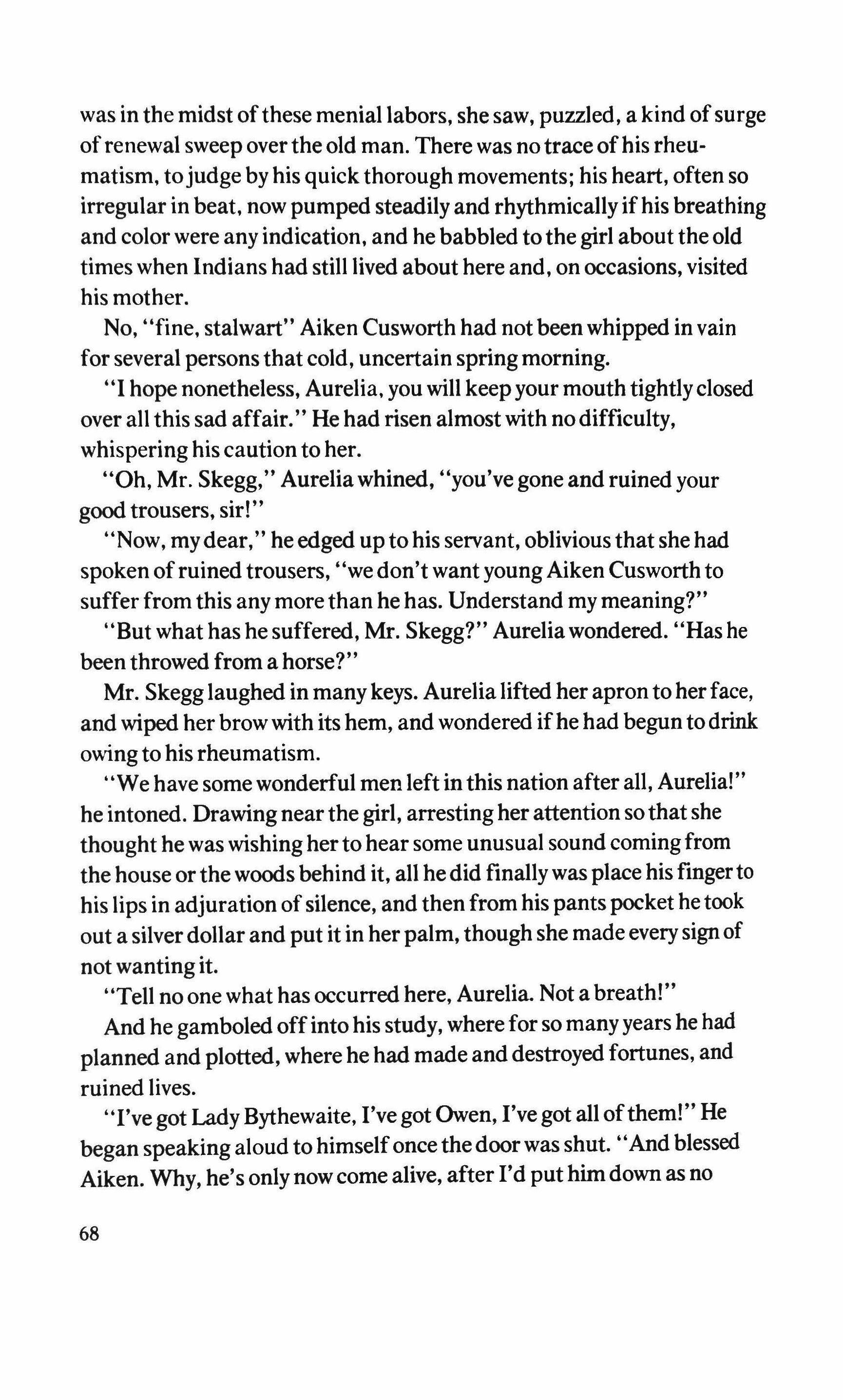
was in the midst ofthese menial labors, she saw, puzzled, a kind ofsurge ofrenewal sweep over the old man. There was no trace ofhis rheumatism, tojudgeby his quickthorough movements; his heart, often so irregular in beat, now pumped steadily and rhythmicallyifhis breathing and color were any indication, and he babbled to the girl about the old times when Indians had still lived about here and, on occasions, visited his mother.
No, "fine, stalwart" Aiken Cusworth had not been whipped in vain for several persons that cold, uncertain springmorning.
"I hope nonetheless, Aurelia. you will keep your mouth tightly closed over all this sad affair." He had risen almost with no difficulty, whispering his caution to her.
"Oh, Mr. Skegg," Aureliawhined, "you've gone and ruined your good trousers, sir!"
"Now, mydear," he edged up to his servant, oblivious that she had spoken ofruined trousers, "we don't want young Aiken Cusworth to suffer from this any more than he has. Understand my meaning?"
"But what has he suffered, Mr. Skegg?" Aureliawondered. "Has he been throwed from a horse?"
Mr. Skegglaughed in many keys. Aurelialifted her apron to herface, and wiped her browwith its hem, and wondered ifhe had begun to drink owing to his rheumatism.
"We have some wonderful men left inthis nation after all, Aurelia!" he intoned. Drawing near the girl, arresting her attention so that she thought he was wishing herto hear some unusual sound comingfrom the house or the woods behind it, all hedid finally was place his fingerto his lips in adjuration ofsilence, and then from his pants pocket he took out a silverdollar and put it in her palm,though she made every signof not wantingit.
"Tell no one what has occurred here, Aurelia. Not a breath!"
And he gamboled offintohis study, where for so many years he had planned and plotted, where he had made and destroyed fortunes, and ruined lives.
"I've got LadyBythewaite, I've got Owen, I've got all ofthem!" He began speaking aloud to himself once thedoor was shut. "And blessed Aiken. Why, he's only now come alive, after I'd put him down as no
68
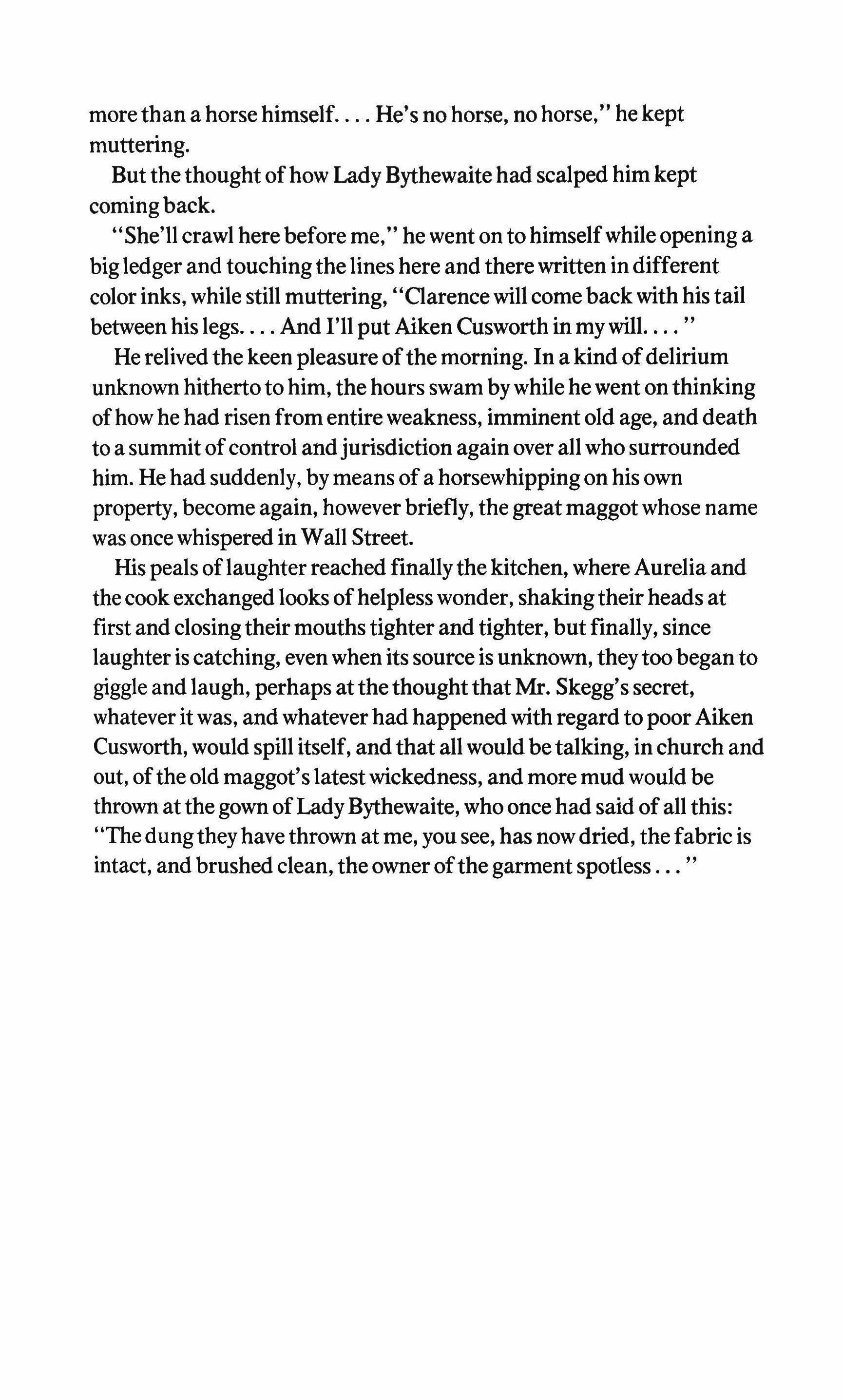
more than a horse himself He's no horse, no horse," he kept muttering.
But thethought ofhow LadyBythewaite had scalped him kept comingback.
"She'll crawl here before me," he went on to himselfwhile opening a bigledger and touchingthe lines here and there written in different color inks, while still muttering, "Clarence will come backwith his tail between his legs And I'll put Aiken Cusworth in my will.
He relived the keen pleasureofthe morning. In a kind ofdelirium unknown hitherto to him, the hours swam bywhile he went on thinking ofhowhe had risen fromentire weakness, imminent old age, and death to a summit ofcontrol andjurisdiction again over all who surrounded him. He had suddenly, by means of a horsewhipping on his own property, become again, however briefly, the greatmaggotwhose name was once whispered in Wall Street.
His peals oflaughter reached finallythe kitchen, where Aurelia and the cook exchanged looks ofhelplesswonder, shakingtheir heads at first and closingtheirmouths tighter and tighter, but finally, since laughteris catching, even when its source is unknown, theytoo began to giggle and laugh, perhaps at thethoughtthat Mr. Skegg's secret, whatever it was, and whateverhad happened with regard to poor Aiken Cusworth, would spill itself, andthat all would betalking, in church and out, ofthe old maggot's latestwickedness, and more mud would be thrown at the gown ofLadyBythewaite, who once had said of all this: "Thedungthey have thrown at me, you see, has now dried, the fabric is intact, and brushed clean, the owner ofthe garmentspotless
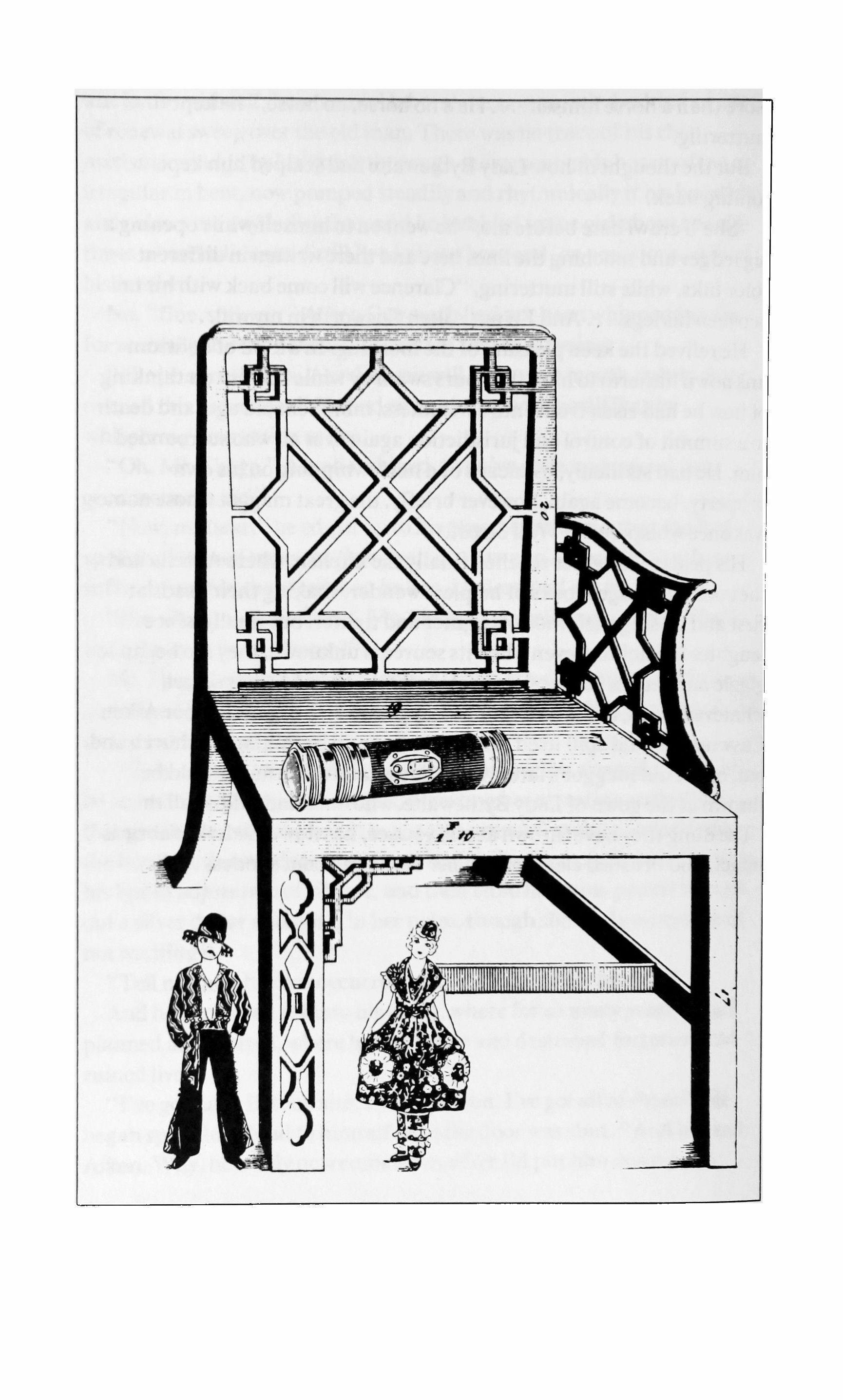
Single for tonight
M. D. Elevitch
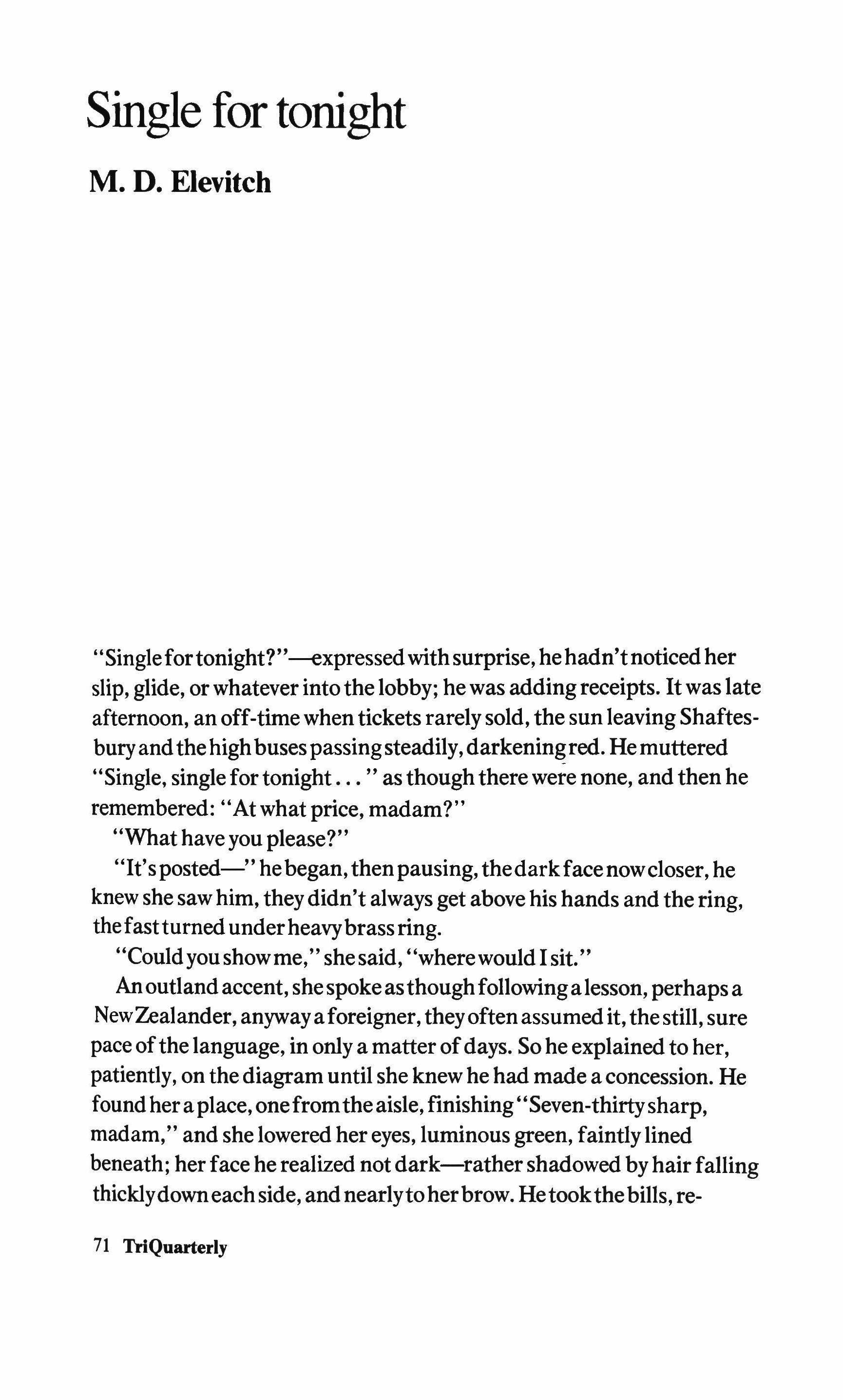
"Singlefortonight?"--expressedwithsurprise, hehadn'tnoticedher slip, glide, or whatever intothe lobby; he was addingreceipts. It was late afternoon, an off-timewhen tickets rarelysold, the sun leaving Shaftesburyandthehighbusespassingsteadily,darkeningred. Hemuttered "Single, single fortonight " as thoughtherewere none, and then he remembered: "Atwhat price, madam?"
"What have you please?"
"It'sposted-" hebegan,then pausing, thedarkface nowcloser, he knew she saw him, theydidn't alwaysget above his hands and the ring, thefasttumed underheavybrassring.
"Couldyou showme," shesaid, "wherewould Isit."
Anoutland accent, shespoke as thoughfollowing a lesson, perhaps a NewZealander, anyway a foreigner,theyoften assumedit, the still, sure pace ofthe language, in only a matter ofdays. So he explained to her, patiently, on the diagram until she knew he had made a concession. He foundher a place, one fromtheaisle,finishing"Seven-thirtysharp, madam," and she lowered her eyes, luminous green, faintlylined beneath; her face he realized not dark-rather shadowed byhair falling thicklydowneachside, andnearlytoherbrow. Hetookthebills, re-
71 TrlQuarterly
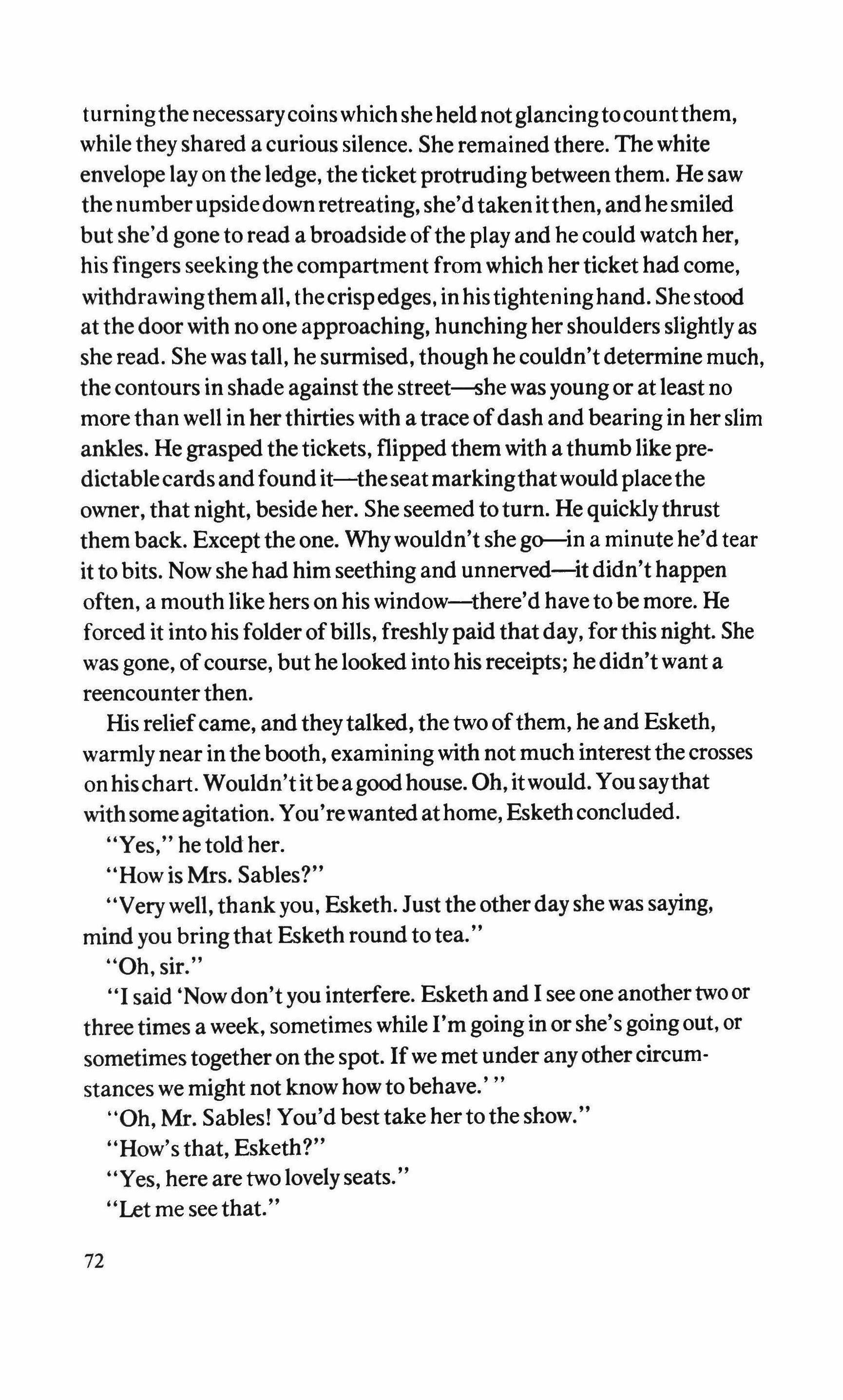
turningthe necessarycoins which sheheld notglancingtocountthem, while they shared a curious silence. She remained there. The white envelopelay on the ledge, the ticket protruding between them. He saw thenumberupsidedownretreating, she'd taken itthen, and hesmiled but she'd gone to read a broadside ofthe play and he could watch her, his fingers seeking the compartment from which her ticket had come, withdrawingthemall, thecrispedges, inhistighteninghand. She stood at the door with no one approaching, hunching her shoulders slightly as she read. She was tall, he surmised, though he couldn't determine much, the contours in shade against the street=-she was young or at least no more than well in herthirties with a trace ofdash and bearing in her slim ankles. He grasped the tickets, flipped them with a thumb like predictablecards andfoundit-the seat markingthatwouldplacethe owner, that night, beside her. She seemed to turn. He quicklythrust them back. Except the one. Whywouldn't she go-in a minute he'd tear it to bits. Now she had him seething and unnerved-it didn't happen often, a mouth like hers on his window-there'd have to be more. He forced it into his folderofbills, freshlypaid that day, forthis night. She was gone, ofcourse, but he looked into his receipts; hedidn't want a reencounter then.
His reliefcame, and theytalked, the two ofthem, he and Esketh, warmly near inthe booth, examiningwith not much interestthe crosses on hischart. Wouldn'titbe a goodhouse. Oh, itwould. You saythat with some agitation. You'rewanted athome, Eskethconcluded.
"Yes," he told her.
"How is Mrs. Sables?"
"Verywell, thankyou, Esketh. Just the other day she was saying, mind you bringthat Esketh round to tea."
"Oh, sir."
"I said 'Nowdon't you interfere. Esketh and I see one another two or three times a week, sometimes while I'm going in or she's going out, or sometimes together on the spot. If we met under any other circumstances we might not know how to behave.' "
"Oh, Mr. Sables! You'd besttakehertotheshow."
"How's that, Esketh?"
"Yes, here are two lovelyseats."
"Let me see that."
72
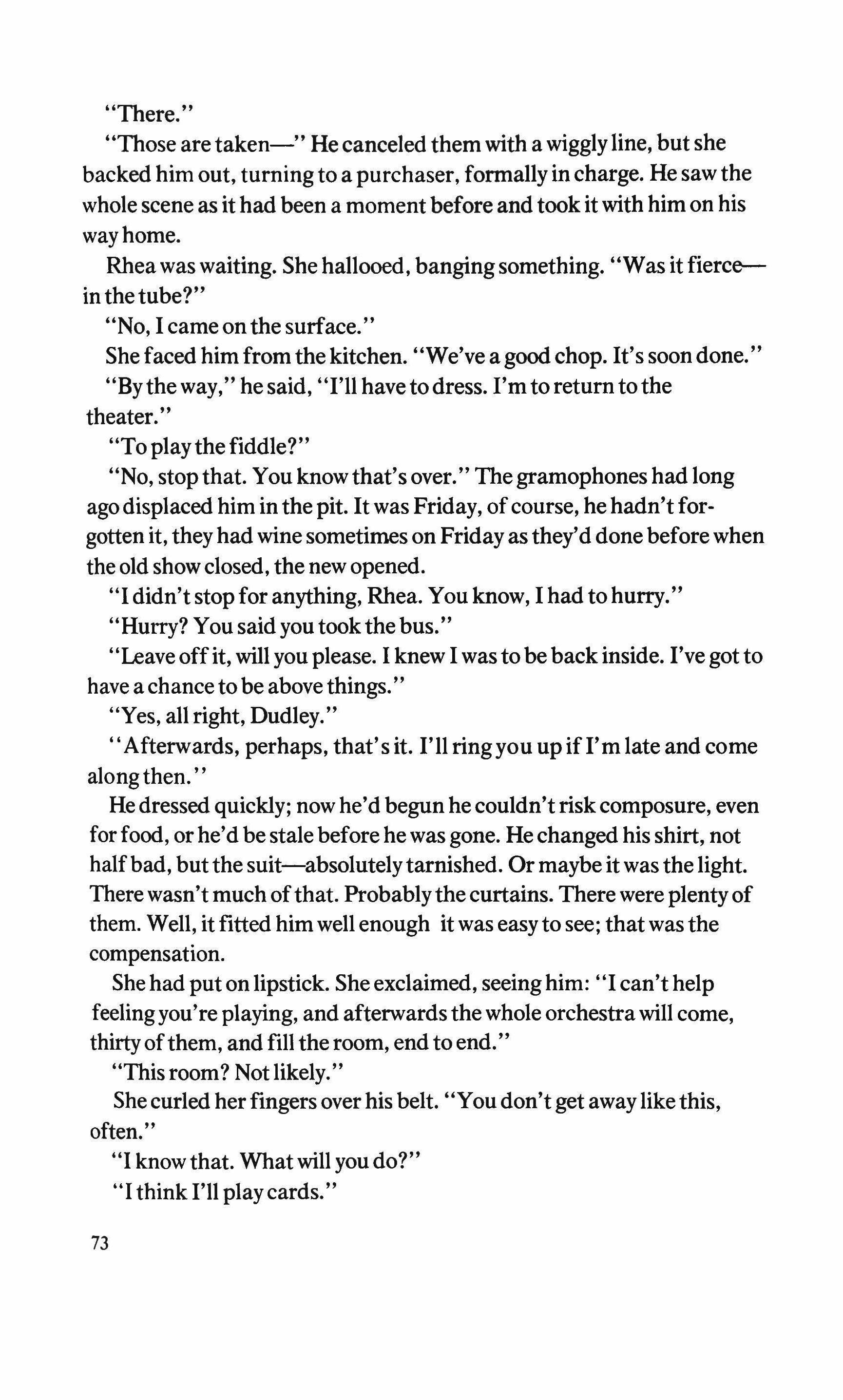
"There."
"Those are taken-" He canceled them with a wigglyline, but she backed him out, turning to a purchaser, formally in charge. He saw the whole scene as it had been a moment before and took it with him on his way home.
Rhea was waiting. She hallooed, bangingsomething. "Was it fierce-in thetube?"
"No, I came on the surface."
She faced him from the kitchen. "We've a goodchop. It's soon done."
"Bythe way," he said, "I'll have to dress. I'm to return to the theater."
"To playthe fiddle?"
"No, stopthat. You knowthat's over." The gramophones had long ago displaced him in the pit. It was Friday, of course, hehadn't forgotten it, theyhad wine sometimes on Friday as they'd done before when the old show closed, the new opened.
"I didn't stop for anything, Rhea. You know, I had to hurry."
Hurry? You said you took the bus."
"Leave offit, will you please. I knew I was to be back inside. I've got to have a chance to be above things."
"Yes, all right, Dudley."
Afterwards, perhaps, that's it. I'll ringyou up ifI'm late and come along then.
He dressed quickly; now he'd begun hecouldn't riskcomposure, even for food, or he'd be stale before he was gone. He changed his shirt, not halfbad, butthe suit-absolutelytarnished. Or maybe it was the light. There wasn't much ofthat. Probablythecurtains. There were plenty of them. Well, it fitted himwell enough it was easyto see; that was the compensation.
She had put on lipstick. She exclaimed, seeing him: "I can't help feelingyou're playing, and afterwards the whole orchestrawill come, thirty ofthem, and fill the room, end to end."
"This room? Not likely."
She curled herfingers over his belt. "You don't get away like this, often."
"I know that. What will you do?"
I think I'll playcards."
73
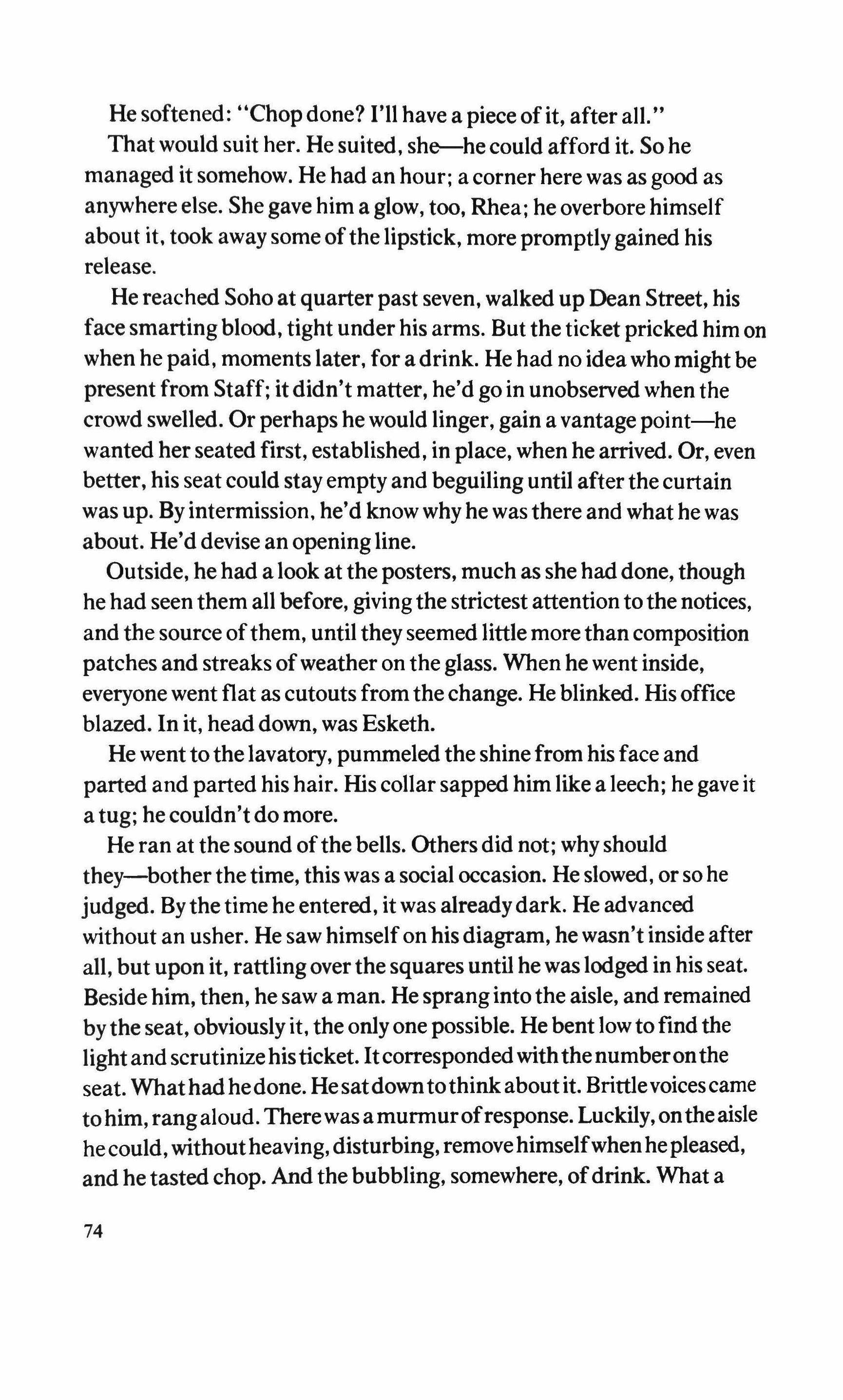
He softened: "Chop done? I'll have a piece of it, after all."
That would suit her. He suited, she-he could afford it. So he managed it somehow. He had an hour; a corner here was as good as anywhere else. She gave him a glow, too, Rhea; he overbore himself about it, took away some ofthe lipstick, more promptlygained his release.
He reached Soho at quarter past seven, walked up Dean Street, his face smartingblood, tight under his arms. But the ticket pricked him on when he paid, moments later, for a drink. He had no ideawho might be present from Staff; itdidn't matter, he'd go in unobserved when the crowd swelled. Or perhaps he would linger, gain a vantage point-he wanted her seated first, established, in place, when he arrived. Or, even better, his seat could stayempty and beguiling until after the curtain was up. Byintermission. he'd know why he was there and what he was about. He'd devise an opening line.
Outside, he had a look at the posters, much as she had done, though he had seen them all before, givingthe strictest attention to the notices, and the source ofthem, until they seemed little more than composition patches and streaks ofweather on the glass. When he went inside, everyone went flat as cutouts fromthe change. He blinked. His office blazed. In it, head down, was Esketh.
He went to the lavatory, pummeled the shinefrom his face and parted and parted his hair. His collar sapped him like a leech; he gave it a tug; he couldn't do more.
He ran at the sound ofthe bells. Others did not; why should they-bother the time, this was a social occasion. He slowed, or so he judged. Bythe time he entered, it was already dark. He advanced without an usher. He saw himself on his diagram, he wasn't inside after all, but upon it, rattling over the squares until he was lodged in his seat. Beside him, then, he saw a man. He sprang into the aisle, and remained bythe seat, obviously it, the only one possible. He bent low to find the light and scrutinizehisticket. Itcorrespondedwiththenumberon the seat. Whathad hedone. Hesatdowntothink aboutit. Brittlevoices came to him, rangaloud. There was a murmur ofresponse. Luckily, on theaisle hecould, withoutheaving,disturbing, remove himselfwhenhepleased, and he tasted chop. And the bubbling, somewhere, ofdrink. What a
74
seat. It gripped and repelled him. Nothing to be done: he'd stay and face itthrough. He even applauded, somewhat wildly, at the end ofthe act, and caught the man's glasses upon him. He followed him into the lobby andlosthim. No, not quite. Hepointedthewaytotheconvenience, butit was somethingelsethe man wanted. Thetelephone. Hespokebroadly, an Americandoubtless, andtookaway a penny. Afterward, it was easy. He had onlyto wait. The man approached, his brow bright. He supposed it was a good play, but he hadn't concentrated. He'd called his wife.
"She had a headache," the man explained.
"That's too bad."
"One ofthesewomanlythings, you know. They come and theygo."
"That's good."
"What?"
I was congratulatingyou on your wife's deliverance from pain."
"Thanks-I'm not sure. The phone didn't answer."
"Well, she maybe asleep."
"It's a loud phone. The room isn't very large, either, although it's largerthan a hotel room, one ofthose bed-sitting rooms, not very much when you look at it, but more comfortable than a room you'd get at a hotel. I didn't ring too long, because itwouldn't be good for a headache."
"Nodoubt."
"The fact is, I don'tthink she's in."
"Excuseme, mightshebeinthebath? Faucetrunning-e-' "She had one before supper. She was coming here." "Here."
"Yes, she wanted to see this show. You'd have seen her, right next to you."
"Iwould, wouldn't I?"
"Yes," he began to chuckle, "wait till she hears about it. It was her night out."
They chuckled together.
"Now, then, did you say it was her night out?"
'Yes, we find it sensible. Weeach like differentthings so everyweek we have a night out."
"Oh, bravo, well planned, verywell planned."
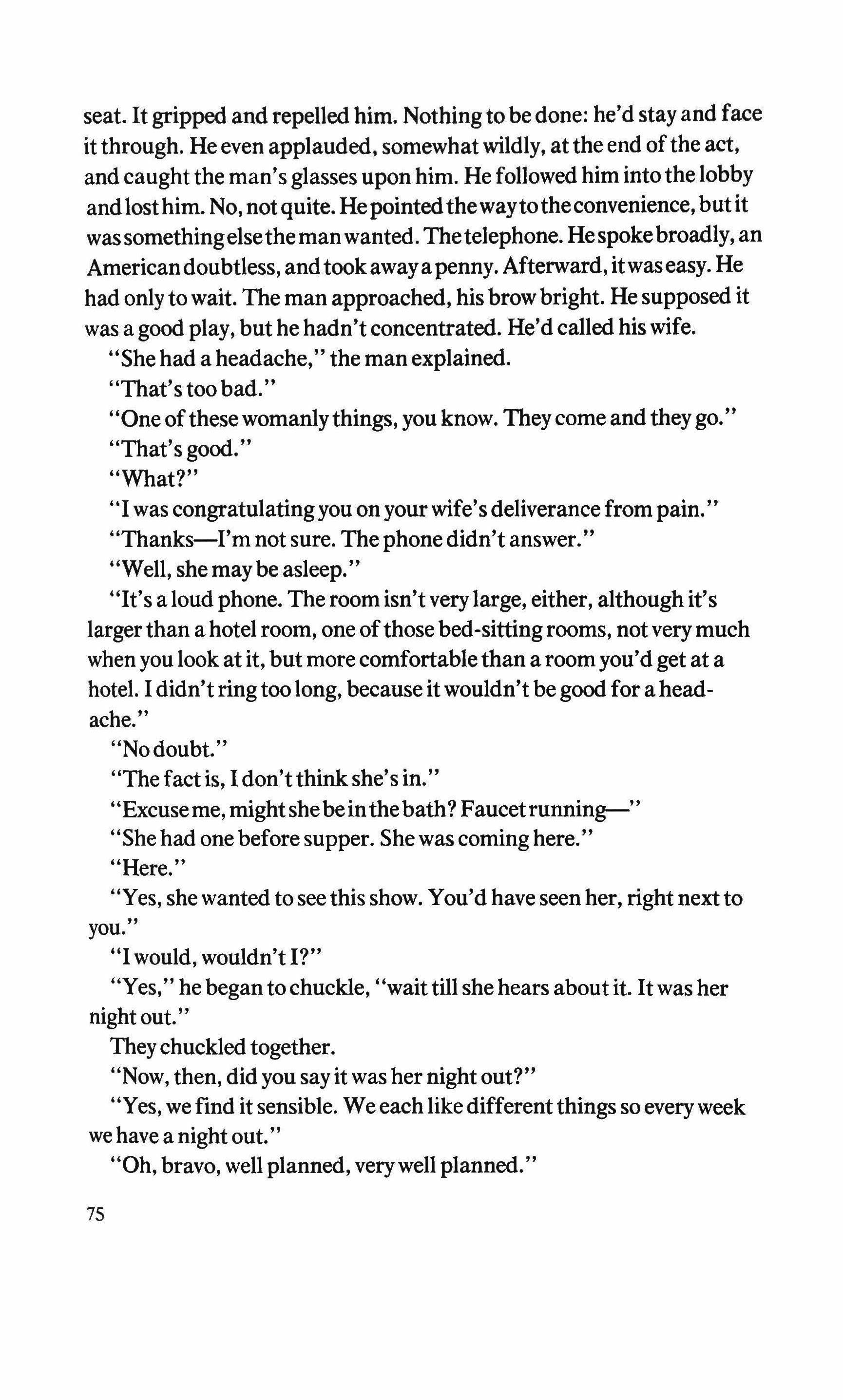
7S
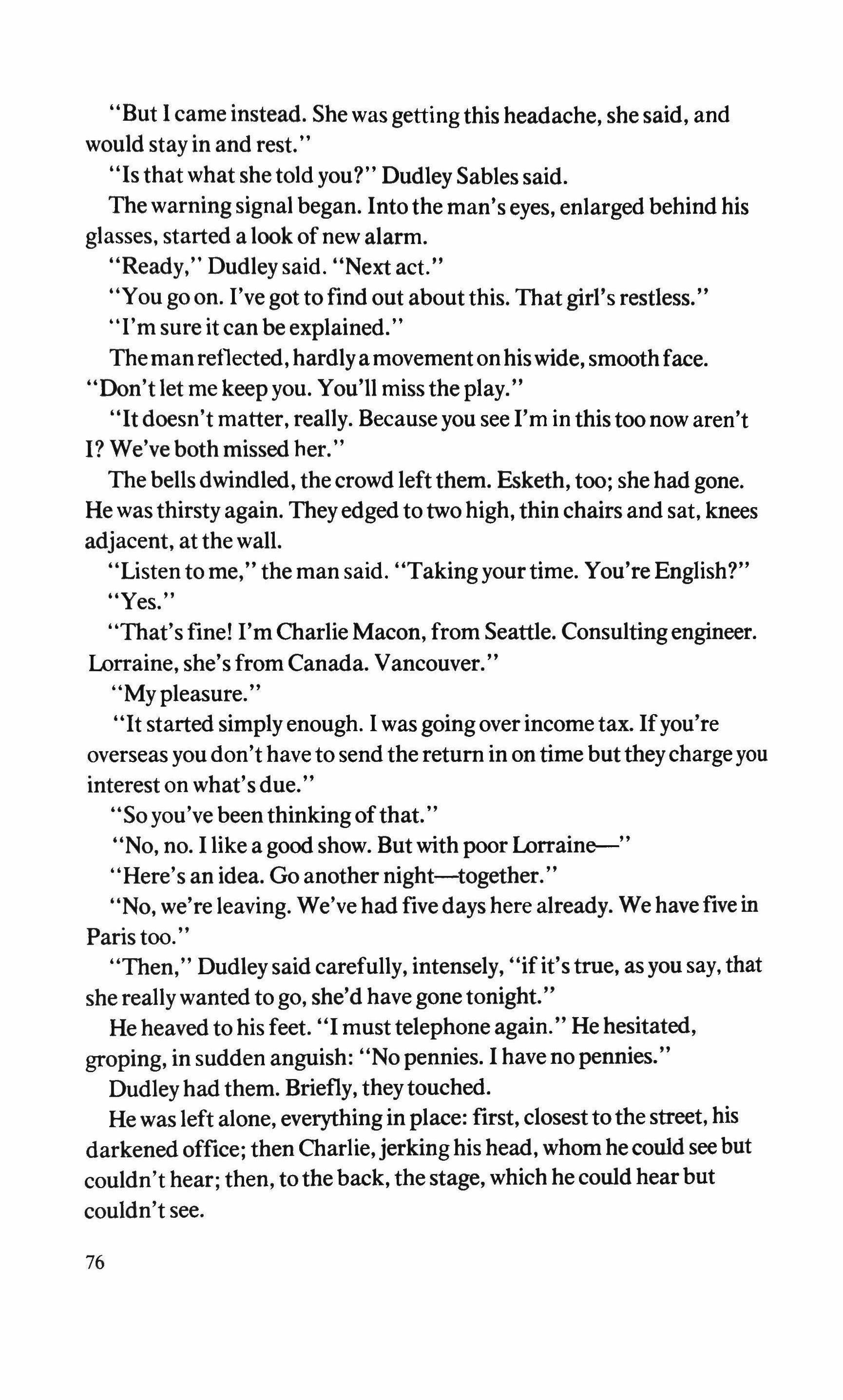
"But I came instead. She was getting this headache, she said, and would stay in and rest."
"Is that what she told you?" Dudley Sables said.
The warningsignal began. Into the man's eyes, enlarged behind his glasses, started a look of new alarm.
"Ready," Dudley said. "Next act."
"You goon. I've got to find out aboutthis. That girl's restless."
I'm sure it can be explained.
The man retlected, hardly a movement on hiswide, smoothface. "Don't let me keep you. You'll miss the play."
"It doesn't matter, really. Because you see I'm in this too now aren't I? We've both missed her."
The bells dwindled, the crowd left them. Esketh, too; she had gone. He was thirstyagain. Theyedged to two high, thin chairs and sat, knees adjacent, at the wall.
"Listen to me," the man said. "Takingyour time. You're English?" "Yes."
"That's fine! I'm Charlie Macon, from Seattle. Consultingengineer. Lorraine, she's from Canada. Vancouver."
"Mypleasure."
•• It started simplyenough. I was going over income tax. Ifyou're overseas youdon't have to send the return in on time buttheychargeyou interest on what's due."
"So you've been thinkingofthat."
"No, no. I like a good show. But with poor Lorraine-"
"Here's an idea. Go another night-together."
"No, we're leaving. We've had five days here already. We have five in Paris too."
"Then," Dudley said carefully, intensely, "ifit's true, as you say, that she reallywanted to go, she'd have gone tonight."
He heaved to his feet. "I must telephoneagain." He hesitated, groping, in sudden anguish: "No pennies. I have no pennies."
Dudleyhad them. Briefly, theytouched.
He was left alone, everything in place: first, closest tothe street, his darkened office; then Charlie,jerkinghis head, whom hecould see but couldn't hear; then, to the back, the stage, which he could hearbut couldn't see.
76
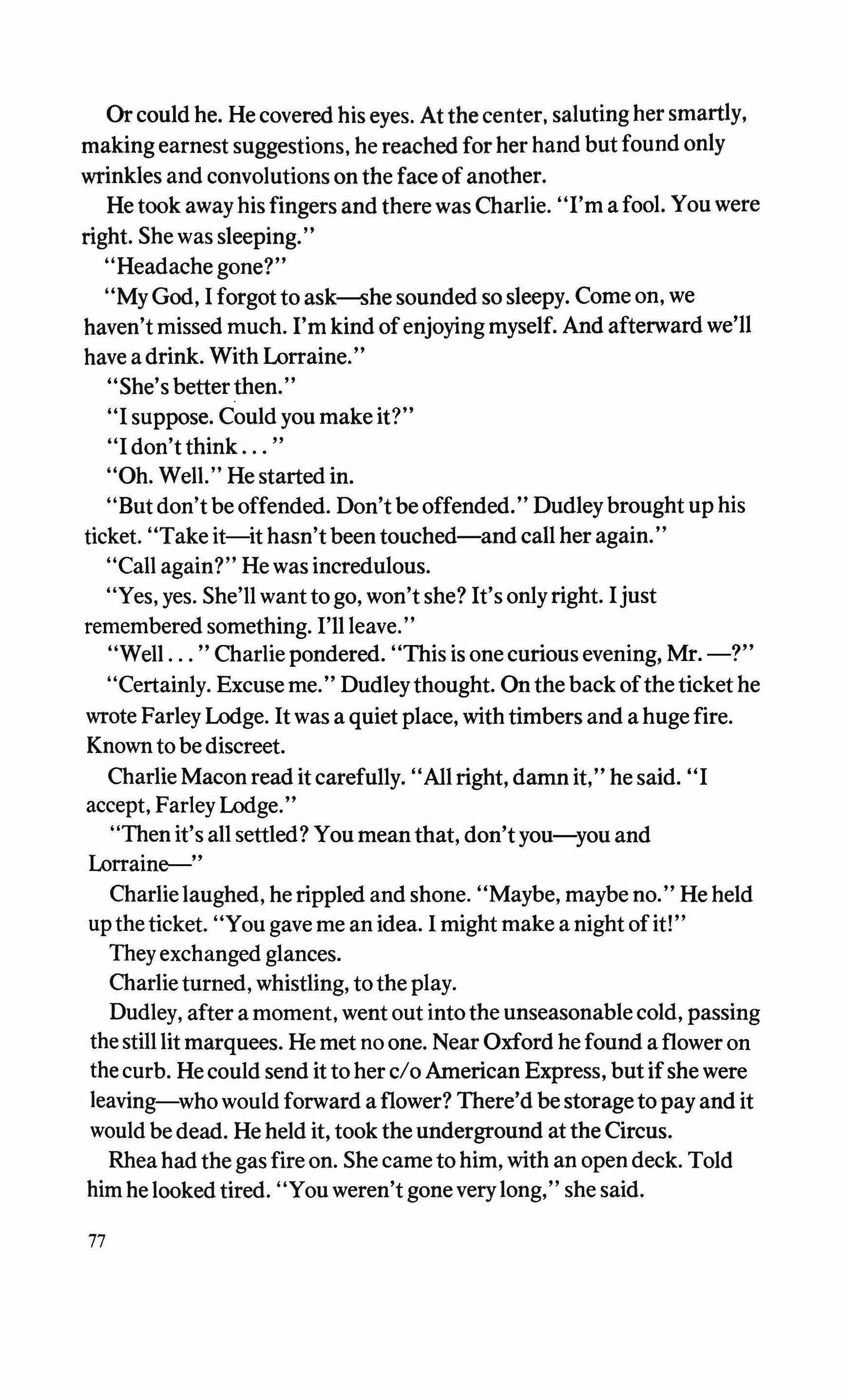
Or could he. He covered his eyes. At the center, saluting her smartly, making earnest suggestions, he reached for her hand but found only wrinkles and convolutions on the face of another.
He took away his fingers and there was Charlie. "I'm a fool. You were right. She was sleeping."
"Headache gone?"
"MyGod, I forgot to ask-she sounded so sleepy. Come on, we haven't missed much. I'm kind ofenjoyingmyself. And afterward we'll have a drink. With Lorraine."
"She's better then."
"I suppose. Could you make it?"
"I don'tthink
"Oh. Well." He started in.
"But don't be offended. Don'tbe offended." Dudleybrought up his ticket. "Take it-it hasn'tbeen touched-and call her again."
"Call again?" He was incredulous.
"Yes, yes. She'll wantto go, won't she? It's onlyright. Ijust remembered something. I'll leave.
"Well Charlie pondered. "This is one curious evening, Mr. -?"
"Certainly. Excuse me." Dudleythought. On the back oftheticket he wrote FarleyLodge. It was a quietplace, with timbers and a hugefire. Known to be discreet.
Charlie Macon read itcarefully. "All right, damn it," he said. "I accept, FarleyLodge."
"Then it's all settled? You mean that, don't you-you and Lorraine---"
Charlielaughed, he rippled and shone. "Maybe, maybe no." He held upthe ticket. "You gave me an idea. I might make a night ofit!"
Theyexchanged glances.
Charlieturned, whistling, to the play.
Dudley, after a moment, went out intothe unseasonable cold, passing the still lit marquees. He met no one. Near Oxford he found a flower on the curb. He could send it to her c/o American Express, but ifshe were leaving-who would forward a flower? There'd be storage to pay and it would be dead. He held it, took the underground at the Circus.
Rheahad the gas fire on. She came to him, with an open deck. Told him helooked tired. 'You weren't gone verylong," she said.
77
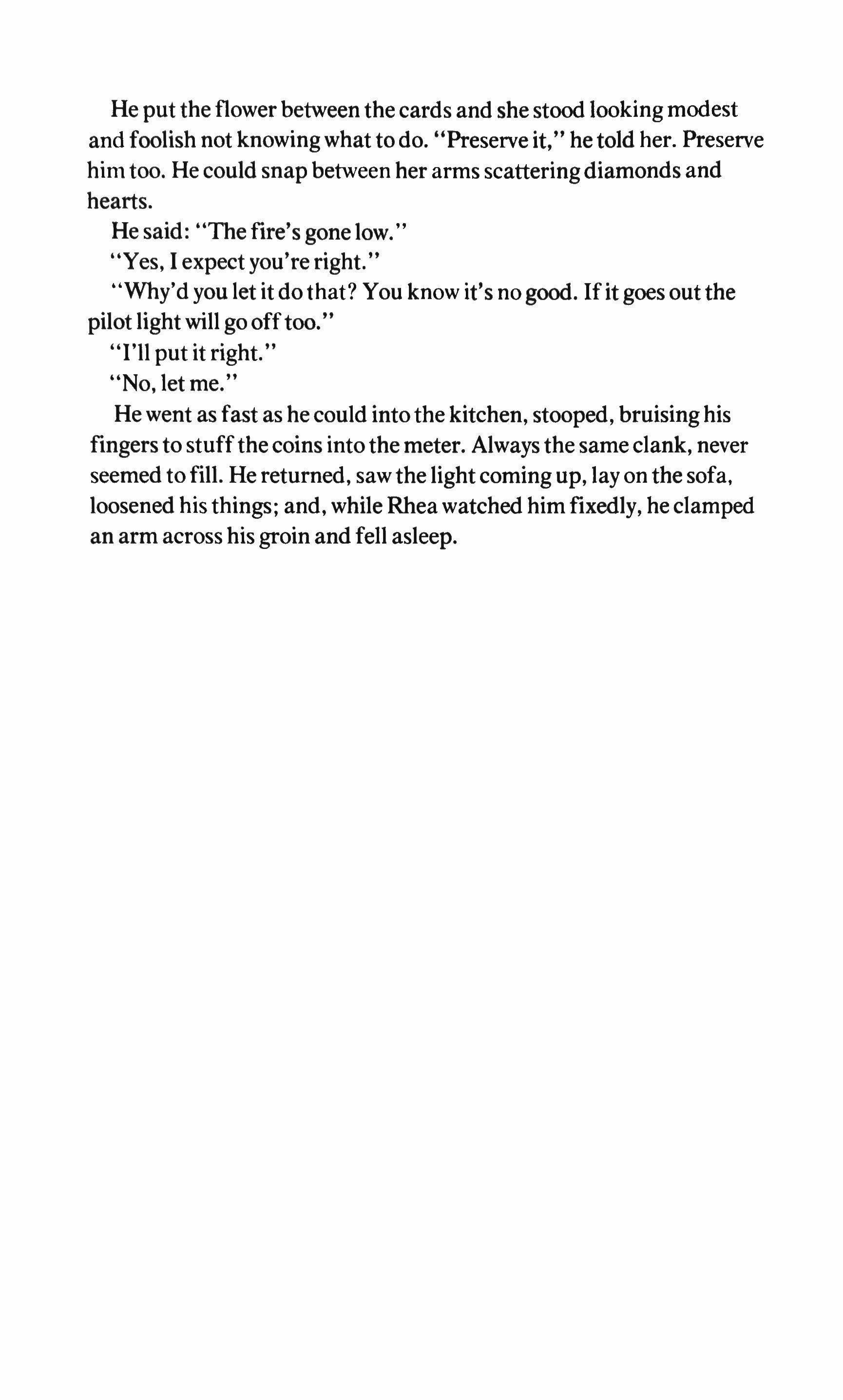
He put the flower between the cards and she stood looking modest and foolish not knowing what to do. "Preserve it," he told her. Preserve him too. He could snap between her arms scatteringdiamonds and hearts.
He said: "The fire's gone low."
"Yes, I expect you'reright."
Why'd you let it do that? You know it's no good. Ifit goes out the pilotlight will go offtoo."
"I'll put it right."
"No, let me."
He went as fast as he could intothe kitchen, stooped, bruising his fingers to stuffthe coins intothe meter. Always the same clank, never seemed to fill. He returned, saw the lightcoming up, lay on the sofa, loosened his things; and, while Rhea watched him fixedly, he clamped an arm across his groin and fell asleep.
Hans Cassebeer and the Virgin's rose
Arthur A. Cohen
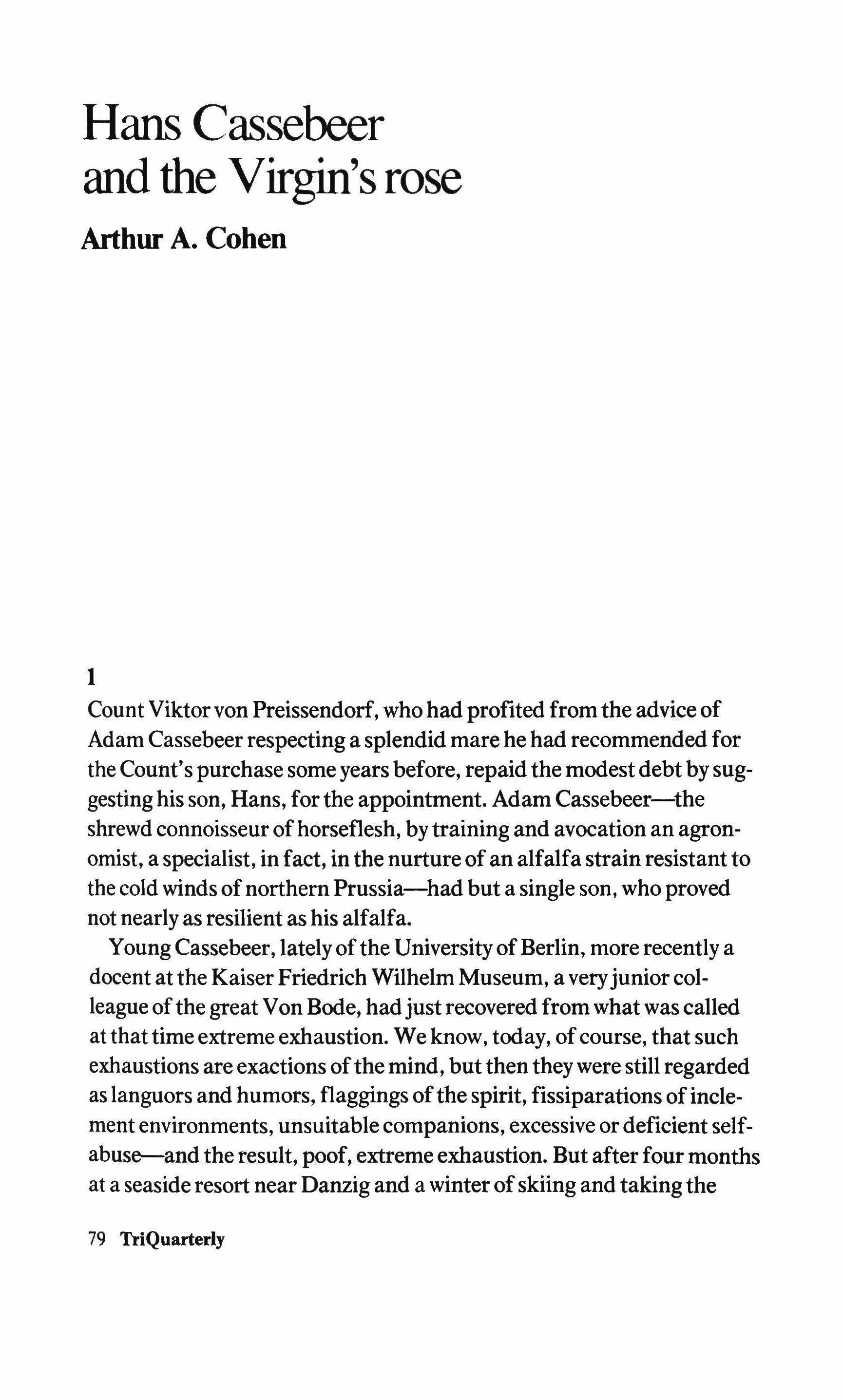
1
Count Viktor von Preissendorf, who had profited from the advice of Adam Cassebeer respecting a splendid mare he had recommended for the Count's purchase some years before, repaid the modest debt by suggesting his son, Hans, forthe appointment. Adam Cassebeer-the shrewd connoisseur ofhorseflesh, bytraining and avocation an agronomist, a specialist, infact, in the nurture of an alfalfa strain resistant to the cold winds ofnorthern Prussia-had but a single son, who proved not nearly as resilient as his alfalfa.
YoungCassebeer, lately ofthe UniversityofBerlin, more recently a docent at the Kaiser Friedrich Wilhelm Museum, a veryjunior colleague ofthe great Von Bode, had just recovered from what was called at thattime extreme exhaustion. We know, today, of course, that such exhaustions are exactions ofthe mind, butthen they were still regarded as languors and humors, flaggings ofthe spirit, fissiparations ofinclement environments, unsuitable companions, excessive or deficient selfabuse--and the result, poof, extreme exhaustion. But after four months at a seaside resort near Danzig and a winter ofskiing and takingthe 79 TriQuarterly
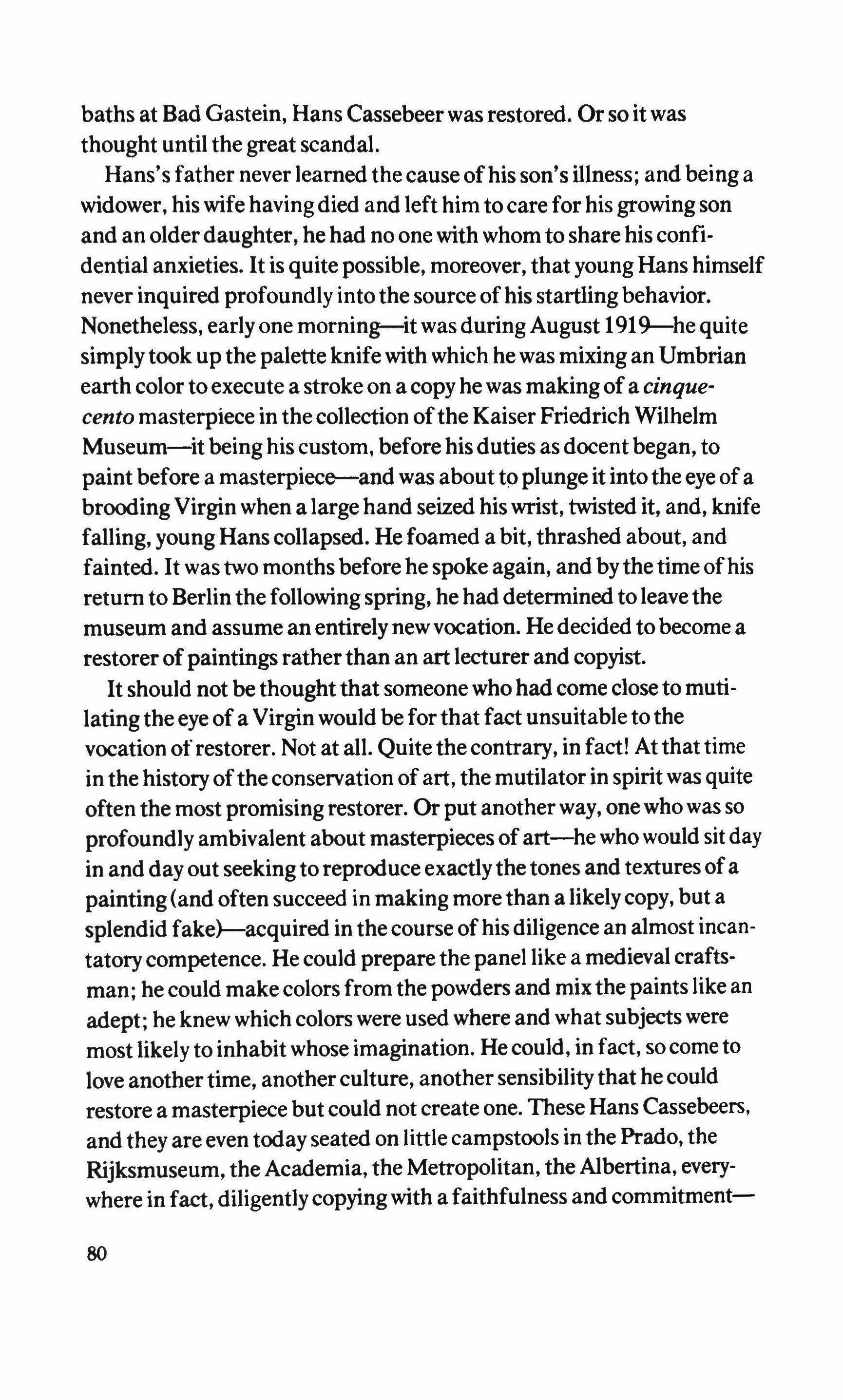
baths at Bad Gastein, Hans Cassebeer was restored. Or so it was thought until the great scandal.
Hans's father never learned the cause ofhis son's illness; and being a widower, hiswifehavingdied and left him to care for his growing son and an older daughter, he had no one with whom to share his contidential anxieties. It is quitepossible, moreover, that young Hans himself never inquired profoundly into the source ofhis startling behavior. Nonetheless, early one morning-it was duringAugust 1919-he quite simply took up the palette knife with which he was mixing an Umbrian earth color to execute a stroke on a copy he was making of a cinquecento masterpiece in thecollection ofthe Kaiser Friedrich Wilhelm Museum-it beinghis custom. before hisduties as docentbegan, to paint before a masterpiece-and was about t() plunge it into the eye of a broodingVirgin when a large hand seized hiswrist, twisted it, and, knife falling, young Hans collapsed. He foamed a bit, thrashed about, and fainted. It was two months before he spokeagain, and bythe time ofhis return to Berlin the followingspring, he had determined to leave the museum and assume an entirely new vocation. He decided to become a restorer ofpaintings ratherthan an art lecturer and copyist. It should not be thought that someone who had come close to mutilating the eye of a Virgin would be forthat fact unsuitable to the vocation ofrestorer. Not at all. Quite thecontrary, in fact! At that time in the historyofthe conservation of art, the mutilator in spirit was quite often the most promising restorer. Or put anotherway, one who was so profoundly ambivalent about masterpieces of art-he who would sit day in and day out seeking to reproduceexactlythe tones and textures of a painting{and often succeed in making more than a likelycopy, but a splendid fake)-acquired in the course ofhis diligence an almost incantatorycompetence. He could preparethe panel like a medieval craftsman; he could make colors from the powders and mix the paints like an adept; he knew which colors were used where and what subjects were most likely to inhabit whose imagination. Hecould, in fact, so come to love anothertime, anotherculture, another sensibilitythat he could restore a masterpiece but could not create one. These Hans Cassebeers, and they are even today seated on little campstools in the Prado, the Rijksmuseum, the Academia. the Metropolitan, the Albertina. everywhere in fact, diligentlycopyingwith a faithfulness and commitment-
80
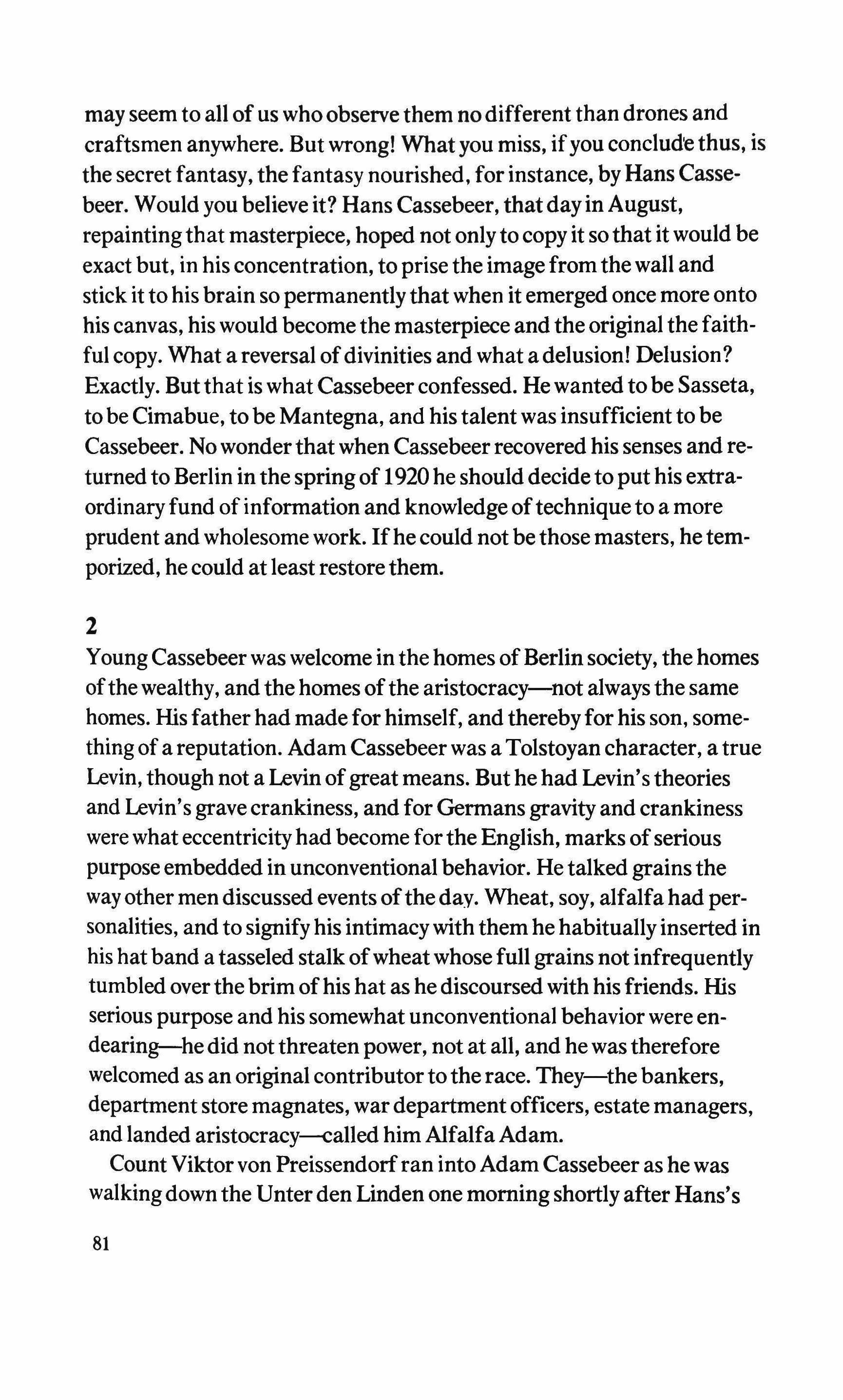
may seem to all of us whoobserve them no different than drones and craftsmen anywhere. But wrong! What you miss, ifyou conclude thus, is the secret fantasy, the fantasy nourished, for instance, by Hans Cassebeer. Would you believe it? HansCassebeer, that dayin August, repaintingthat masterpiece, hoped not only to copy it so that it would be exact but, in his concentration, to prise the image from thewall and stick it to his brain so permanentlythat when it emerged once more onto his canvas, his would become the masterpiece and the original the faithful copy. What a reversal ofdivinities and what a delusion! Delusion? Exactly. Butthat is what Cassebeer confessed. He wanted to be Sasseta, to be Cimabue, to be Mantegna, and his talent was insufficient to be Cassebeer. No wonderthat when Cassebeer recovered his senses and returned to Berlin inthe springof 1920 he should decide to put his extraordinaryfund of information and knowledgeoftechnique to a more prudent and wholesome work. Ifhe could not bethose masters, he temporized, hecould at least restore them.
2
Young Cassebeer was welcome in the homes of Berlin society, the homes ofthe wealthy, and the homes ofthe aristocracy-not always the same homes. His father had madeforhimself, and therebyfor his son, something of a reputation. Adam Cassebeer was a Tolstoyan character, a true Levin, though not a Levin ofgreat means. But he had Levin's theories and Levin's grave crankiness, and for Germans gravity and crankiness were what eccentricityhad become forthe English, marks ofserious purpose embedded in unconventional behavior. He talked grains the way other men discussed events oftheday. Wheat, soy, alfalfahad personalities, and to signify his intimacywith them he habitually inserted in his hat band a tasseled stalk ofwheatwhose full grains not infrequently tumbled over the brim ofhis hat as he discoursed with his friends. His serious purpose and his somewhat unconventional behavior were endearing--hedid not threaten power, not at all, and he was therefore welcomed as an original contributor to the race. They-thebankers, department store magnates, war departmentofficers, estate managers, and landed aristocracy--called him Alfalfa Adam.
Count Viktor von Preissendorf ran into Adam Cassebeer as he was walkingdown the Unter den Linden one morningshortlyafter Hans's
81
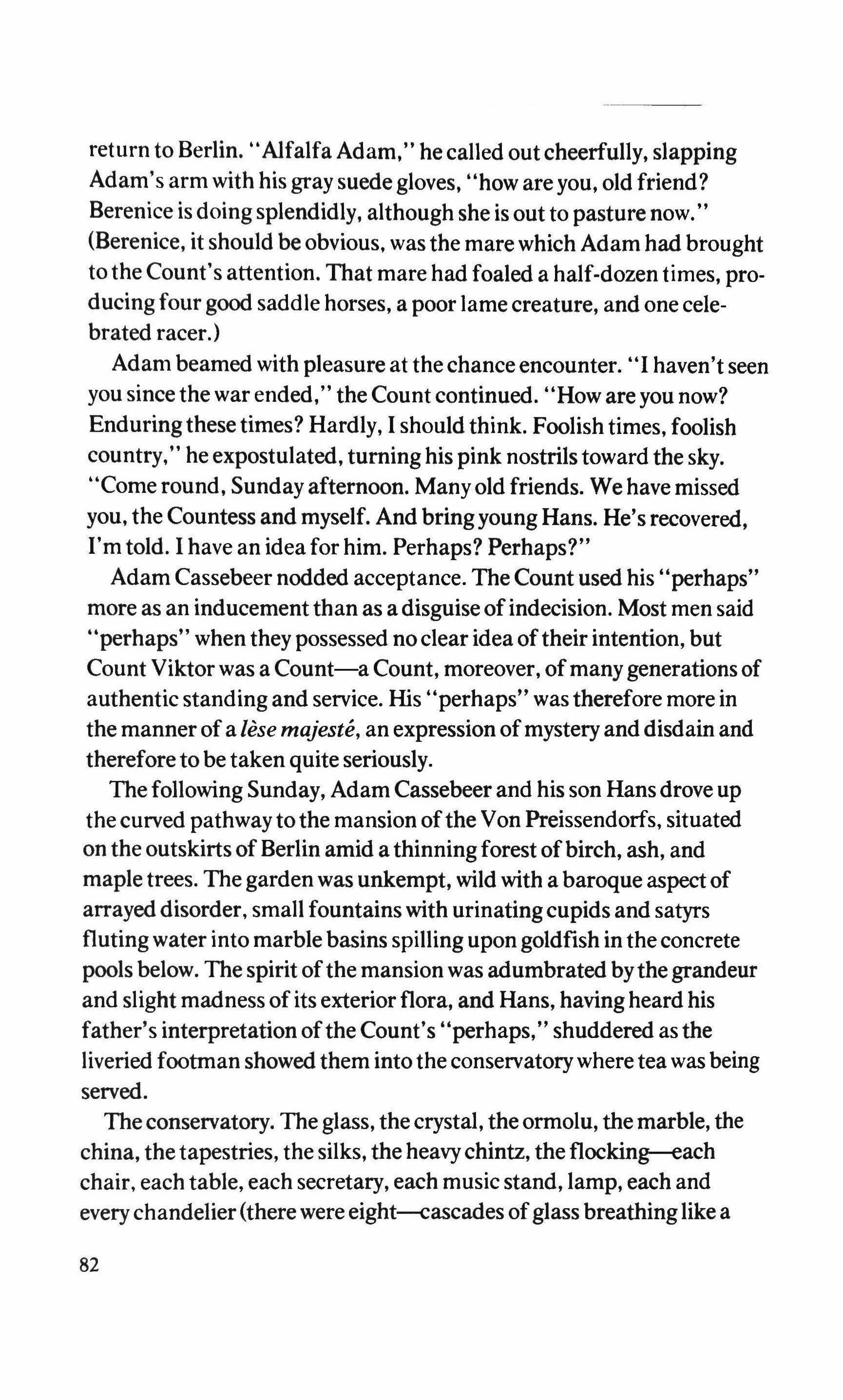
return to Berlin. "Alfalfa Adam," he called out cheerfully, slapping Adam's arm with his gray suede gloves, "how are you, old friend? Berenice is doingsplendidly, although she is out to pasture now." (Berenice, it should be obvious, was the mare which Adam had brought to the Count's attention. That mare had foaled a half-dozen times, producing four good saddle horses, a poor lame creature, and one celebrated racer.)
Adam beamed with pleasure at the chance encounter. "I haven't seen you since the war ended," the Count continued. "How are you now? Enduringthese times? Hardly, I should think. Foolish times, foolish country," he expostulated, turning his pink nostrils toward the sky. "Come round, Sunday afternoon. Manyold friends. We have missed you, the Countess and myself. And bringyoung Hans. He's recovered, I'm told. I have an idea for him. Perhaps? Perhaps?"
Adam Cassebeer nodded acceptance. The Count used his "perhaps" more as an inducement than as a disguise ofindecision. Most men said "perhaps" when theypossessed no clear idea oftheir intention, but Count Viktor was a Count-a Count, moreover, ofmany generations of authentic standing and service. His "perhaps" was therefore more in the manner of a lese majeste, an expression ofmystery and disdain and therefore to be taken quiteseriously.
The following Sunday, Adam Cassebeer and his son Hans drove up the curved pathway to the mansion ofthe Von Preissendorfs, situated on the outskirts ofBerlin amid a thinningforest ofbirch, ash, and maple trees. The garden was unkempt, wild with a baroque aspectof arrayeddisorder, small fountains with urinatingcupids and satyrs fluting water into marble basins spilling upon goldfish in the concrete pools below. The spirit ofthe mansion was adumbrated bythe grandeur and slight madness of its exterior flora, and Hans, having heard his father's interpretation ofthe Count's "perhaps," shuddered as the liveried footman showed them into the conservatorywhere tea was being served.
The conservatory. The glass, the crystal, the ormolu, the marble, the china, thetapestries, the silks, the heavychintz, the flocking-each chair, each table, each secretary, each music stand, lamp, each and every chandelier (there were eight----cascades ofglassbreathinglike a
82
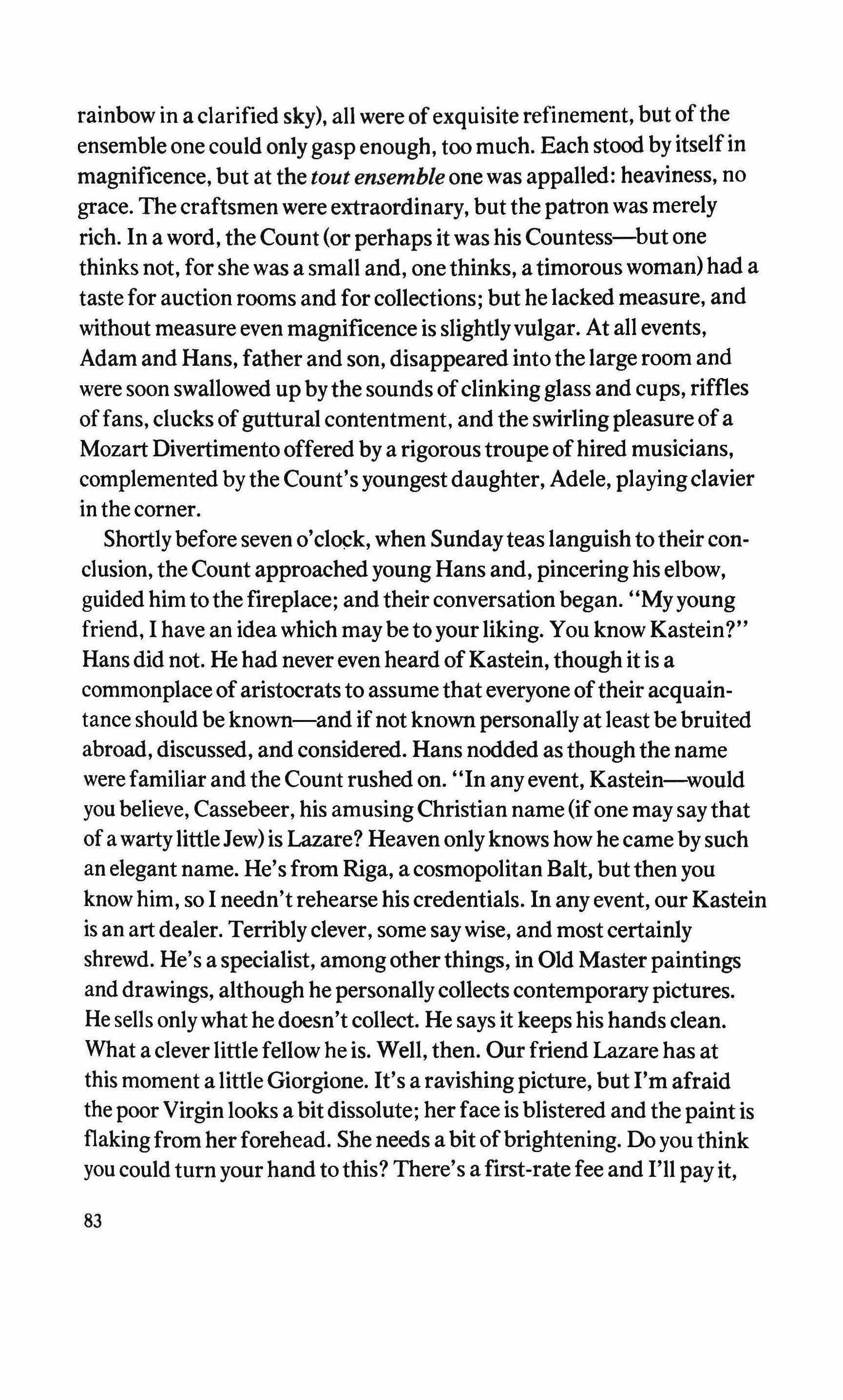
rainbow in a clarified sky), all were ofexquisite refinement, but ofthe ensemble one could onlygasp enough, too much. Each stood by itselfin magnificence, but at the tout ensemble one was appalled: heaviness, no grace. The craftsmen were extraordinary, but the patron was merely rich. In a word, the Count (orperhaps it was his Countess-but one thinks not, for she was a small and, one thinks, a timorous woman) had a taste for auction rooms and forcollections; but he lacked measure, and without measure even magnificence is slightlyvulgar. At all events, Adam and Hans, father and son, disappeared into the large room and were soon swallowed up bythe sounds ofclinkingglass and cups, riffles offans, clucks ofguttural contentment, and the swirlingpleasure of a Mozart Divertimento offered by a rigoroustroupe ofhired musicians, complementedbythe Count'syoungest daughter, Adele, playingclavier in the corner.
Shortlybefore seven 0'clock, when Sundayteas languish to their conclusion, the Count approached young Hans and, pincering his elbow, guided him tothe fireplace; and their conversation began. "Myyoung friend, I have an idea which may be to your liking. You know Kastein?" Hansdid not. He had never even heard of Kastein, though it is a commonplaceofaristocrats to assume that everyone oftheir acquaintance should be known-and if not known personally at least be bruited abroad, discussed, and considered. Hans nodded as thoughthe name were familiar and the Count rushed on. "In any event, Kastein-would you believe, Cassebeer, his amusingChristian name (if one may say that of a wartylittleJew) is Lazare? Heaven onlyknows how he came by such an elegant name. He's from Riga, a cosmopolitan Balt, butthen you knowhim, so I needn'trehearse his credentials. In any event, our Kastein is an art dealer. Terriblyclever, some saywise, and most certainly shrewd. He's a specialist, among otherthings, in Old Master paintings and drawings, although he personallycollects contemporarypictures. He sells onlywhat he doesn't collect. He says it keeps his hands clean. What a cleverlittle fellow he is. Well, then. Our friend Lazare has at this moment a little Giorgione. It's a ravishingpicture, but I'm afraid the poor Virgin looks a bitdissolute; her face is blistered and the paint is flakingfromherforehead. She needs a bit ofbrightening. Do you think you could turn your hand to this? There's a first-rate fee and I'll payit,
83
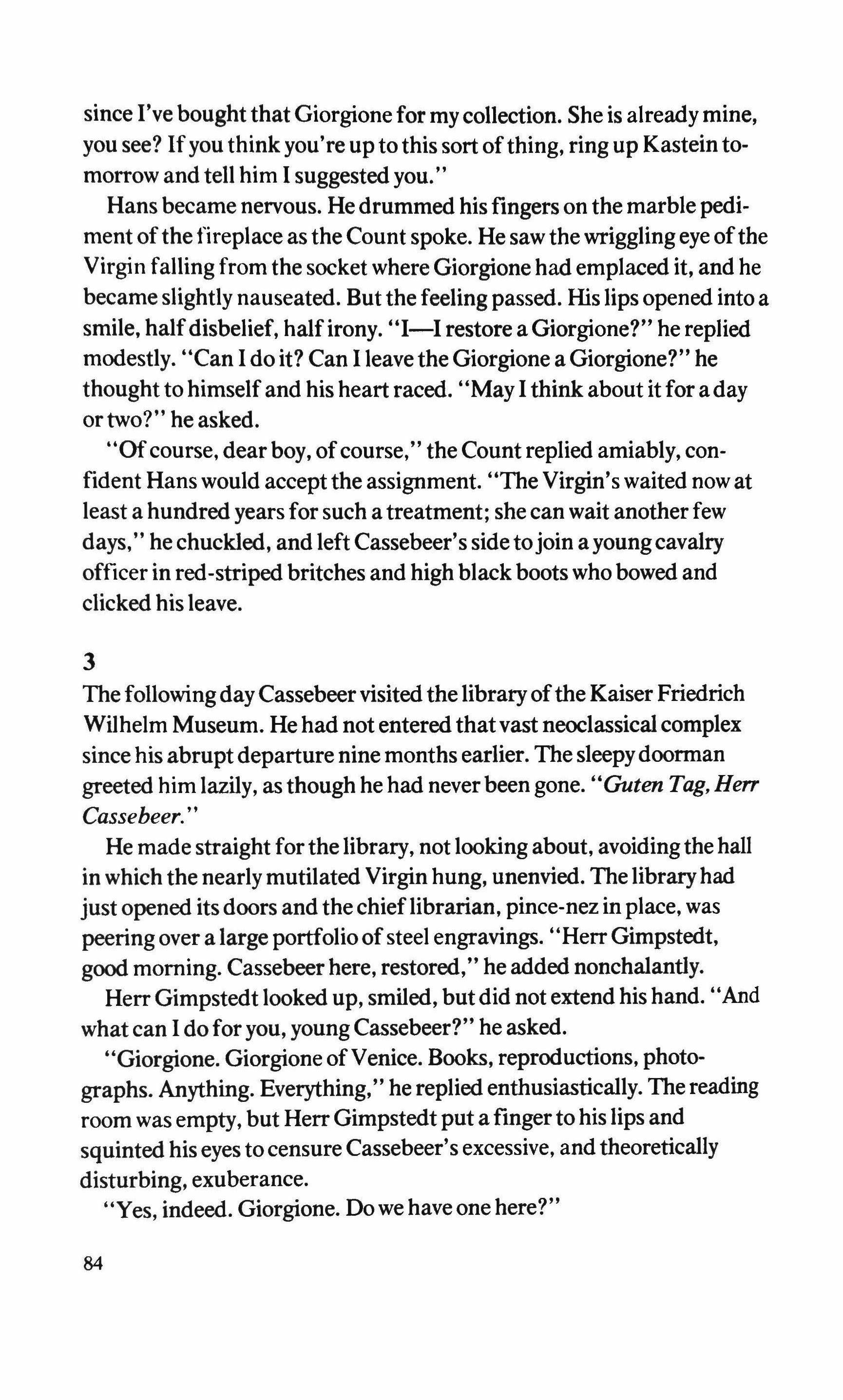
since I've bought that Giorgione for my collection. She is alreadymine, you see? Ifyou think you're up to this sort ofthing, ring up Kastein tomorrow and tell him 1 suggestedyou."
Hans became nervous. He drummed his fingers on the marble pediment ofthe fireplace as the Count spoke. He saw the wriggling eye ofthe Virgin falling from the socket where Giorgione had emplaced it, and he became slightly nauseated. But the feelingpassed. His lipsopened into a smile, halfdisbelief, halfirony. "1-1 restore a Giorgione?" he replied modestly. "Can 1 do it? Can 1 leave the Giorgione a Giorgione?" he thought to himselfand his heart raced. "May 1 think about it for aday or two?" he asked.
"Of course, dear boy, ofcourse," the Count replied amiably, confident Hans would accept the assignment. "The Virgin'swaited now at least a hundred years for such a treatment; she can wait another few days," he chuckled, and left Cassebeer's side tojoin a youngcavalry officer in red-striped britches and high black boots who bowed and clicked his leave.
3
The followingdayCassebeervisited the library ofthe Kaiser Friedrich Wilhelm Museum. He had not entered thatvast neoclassical complex since his abruptdeparture nine months earlier. The sleepydoorman greeted him lazily, as though he had never been gone. "Guten Tag, Herr Cassebeer.
He made straight forthe library, not looking about, avoidingthe hall in which the nearly mutilated Virginhung, unenvied. The libraryhad justopened its doors and the chieflibrarian, pince-nez in place, was peering over a largeportfolioofsteel engravings. "Herr Gimpstedt, good morning. Cassebeer here, restored," he added nonchalantly. Herr Gimpstedt looked up, smiled, butdid not extend his hand. "And what can I do for you, young Cassebeer?" he asked.
"Giorgione. Giorgione ofVenice. Books, reproductions, photographs. Anything. Everything," he repliedenthusiastically. The reading room was empty, but Herr Gimpstedtput a finger to his lips and squinted his eyes to censure Cassebeer's excessive, and theoretically disturbing, exuberance.
"Yes, indeed. Giorgione. Do we have one here?"
84
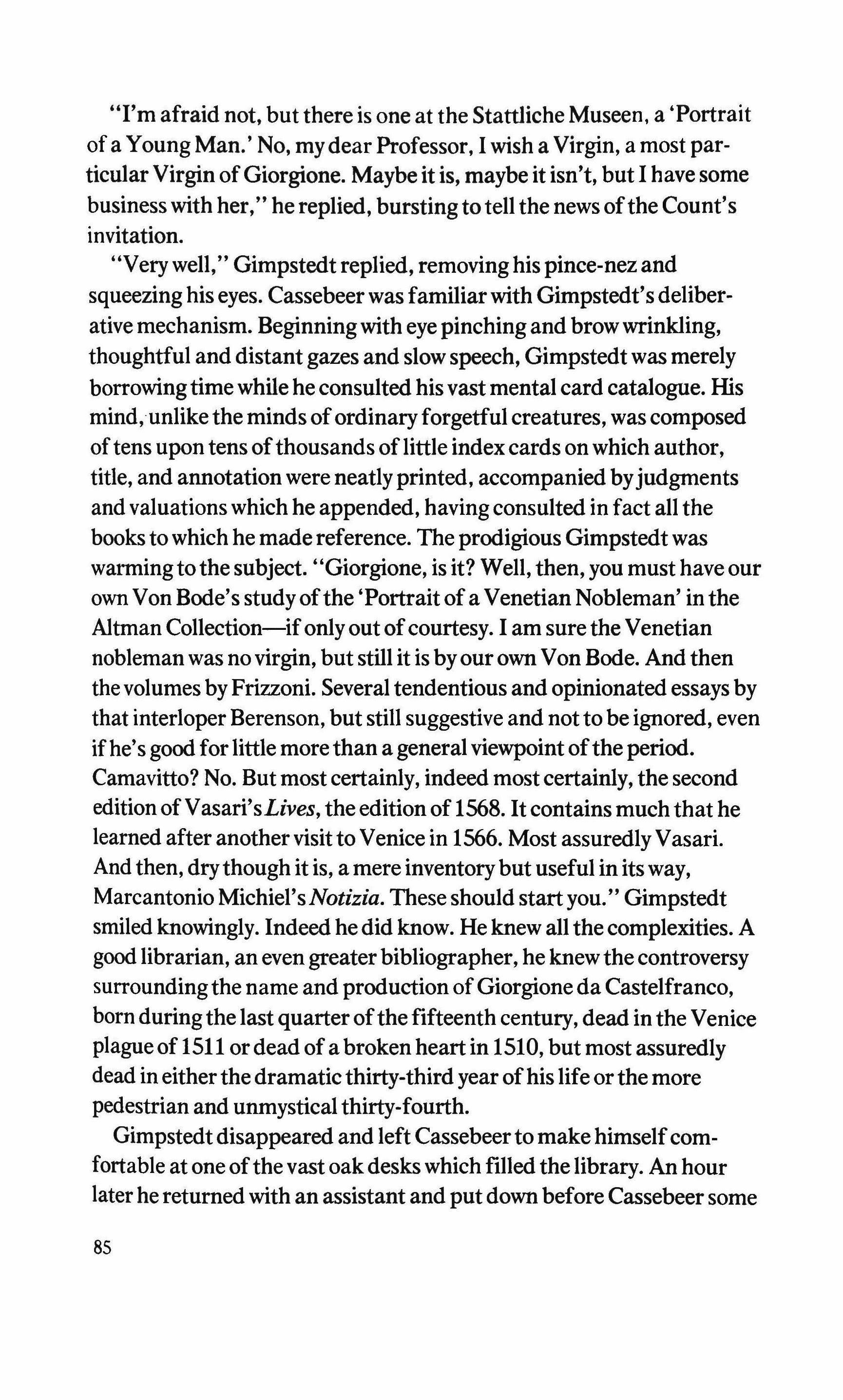
"I'm afraid not, but there is one at the Stattliche Museen, a 'Portrait of a Young Man.' No, mydear Professor, I wish a Virgin, a most particular Virgin ofGiorgione. Maybe it is, maybe it isn't, but I have some business with her," he replied, bursting to tell the news ofthe Count's invitation.
"Verywell," Gimpstedtreplied, removinghis pince-nez and squeezing his eyes. Cassebeer was familiarwith Gimpstedt's deliberative mechanism. Beginningwith eye pinchingand browwrinkling, thoughtful and distant gazes and slow speech, Gimpstedt was merely borrowingtime while he consulted his vast mental card catalogue. His mind, unlike the minds ofordinaryforgetful creatures, was composed oftens upon tens ofthousands oflittle indexcards on which author, title, and annotation were neatlyprinted, accompaniedbyjudgments and valuations which he appended, havingconsulted in fact all the books to which he madereference. The prodigiousGimpstedt was warmingtothe subject. "Giorgione, is it? Well, then, you must have our own Von Bode's studyofthe 'Portrait of a Venetian Nobleman' in the Altman Collection-ifonly out ofcourtesy. I am sure the Venetian nobleman was no virgin, but still it is by our own Von Bode. And then thevolumes by Frizzoni. Several tendentious and opinionated essays by that interloper Berenson, but still suggestive and not to be ignored, even ifhe's good forlittle more than a generalviewpoint ofthe period. Camavitto? No. But most certainly, indeed most certainly, the second editionofVasari'sLives, the edition ofl568. It contains much that he learned after anothervisit to Venice in 1566. Most assuredly Vasari. And then, drythough it is, a mere inventorybut useful in its way, Marcantonio Michiel'sNotizia. These should start you." Gimpstedt smiled knowingly. Indeed he did know. He knew all thecomplexities. A good librarian, an even greaterbibliographer, he knewthecontroversy surroundingthe name and production ofGiorgione da Castelfranco, born duringthe last quarter ofthefifteenth century, dead in the Venice plague of 1511 or dead of a broken heart in 1510, but most assuredly dead in eitherthe dramaticthirty-third year ofhis life or the more pedestrian and unmysticalthirty-fourth.
Gimpstedtdisappeared and left Cassebeer to make himself comfortable at one ofthe vast oakdesks which filled the library. An hour later he returned with an assistant and put down before Cassebeer some
8S
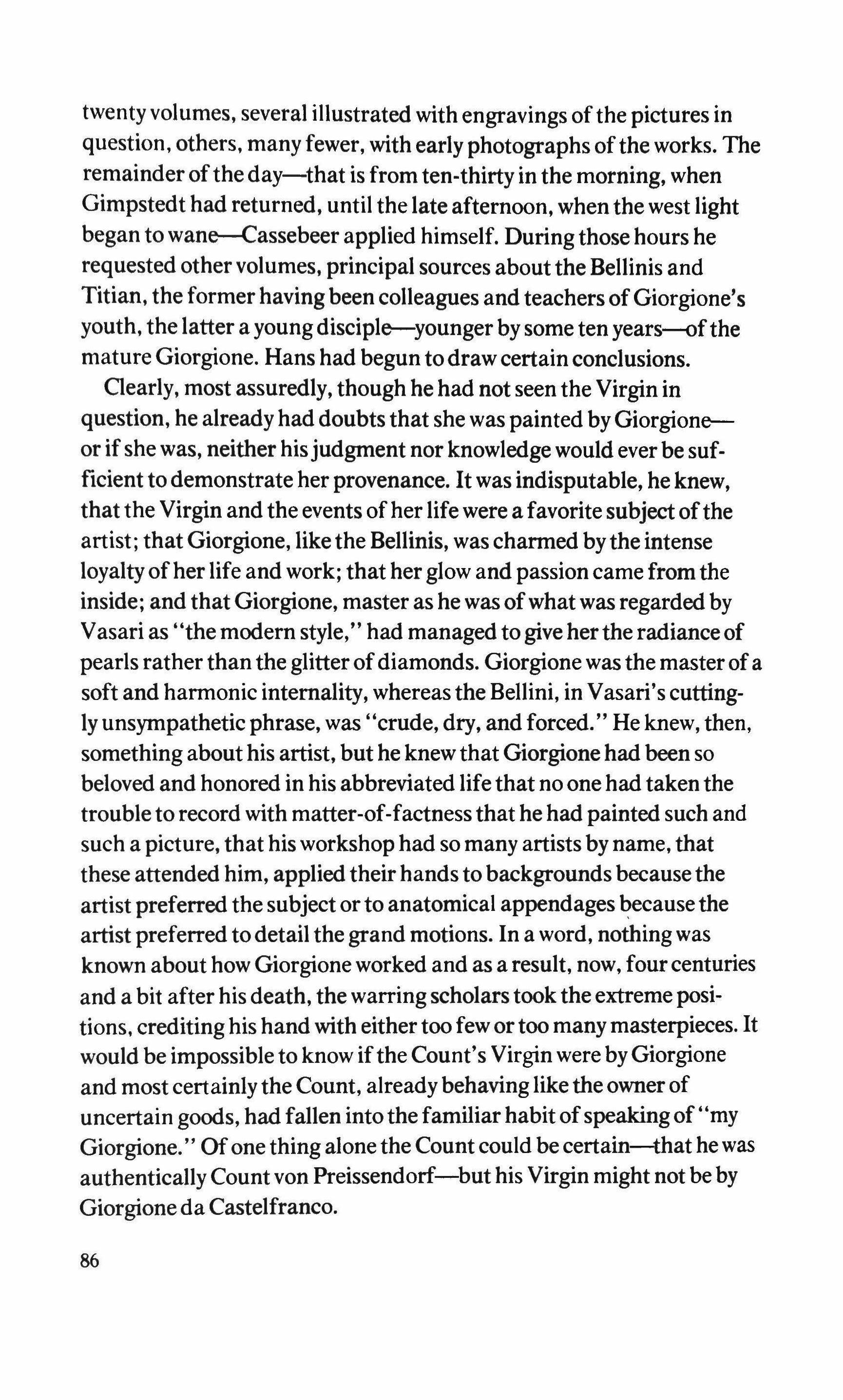
twentyvolumes, several illustrated with engravings ofthe pictures in question, others, many fewer, with earlyphotographs ofthe works. The remainder ofthe day-that is from ten-thirty in the morning, when Gimpstedt had returned, until the late afternoon, when the west light began to wane-Cassebeer applied himself. During those hours he requested other volumes, principal sources about the Bellinis and Titian, the former havingbeen colleagues and teachers of Giorgione's youth, the latter a young disciple-youngerby some ten years-ofthe mature Giorgione. Hans had begun to draw certain conclusions.
Clearly, most assuredly, though he had not seen the Virgin in question, he already had doubts that she was paintedbyGiorgioneor ifshe was, neither hisjudgment nor knowledge would ever be sufficient to demonstrate her provenance. It was indisputable, he knew, that the Virgin and the events ofher life were a favorite subject ofthe artist; that Giorgione, likethe Bellinis, was charmed bythe intense loyaltyofher life and work; that her glow and passion came from the inside; and that Giorgione, master as he was ofwhat was regardedby Vasari as "the modern style," had managed to give herthe radiance of pearls rather than the glitter ofdiamonds. Giorgione was the master of a soft and harmonic internality, whereas the Bellini, in Vasari's cuttingIyunsympatheticphrase, was "crude, dry, and forced." He knew, then, something about his artist, but he knewthat Giorgione had been so beloved and honored in his abbreviated life that no one had taken the trouble to record with matter-of - factness that he had painted such and such a picture, that his workshop had so many artists by name, that these attended him, applied their hands to backgrounds becausethe artist preferred the subject or to anatomical appendagesbecausethe artist preferred to detail the grand motions. In a word, nothing was known about how Giorgione worked and as a result, now, fourcenturies and a bit after his death, the warring scholars took the extreme positions, crediting his hand with either too few or too many masterpieces. It would be impossible to know ifthe Count's Virgin were byGiorgione and most certainlythe Count, alreadybehaving like the owner of uncertain goods, had fallen intothe familiar habit ofspeakingof"my Giorgione." Of one thing alone the Count could be certain-that he was authentically Count von Preissendorf-but his Virgin might not beby Giorgione da Castelfranco.
86
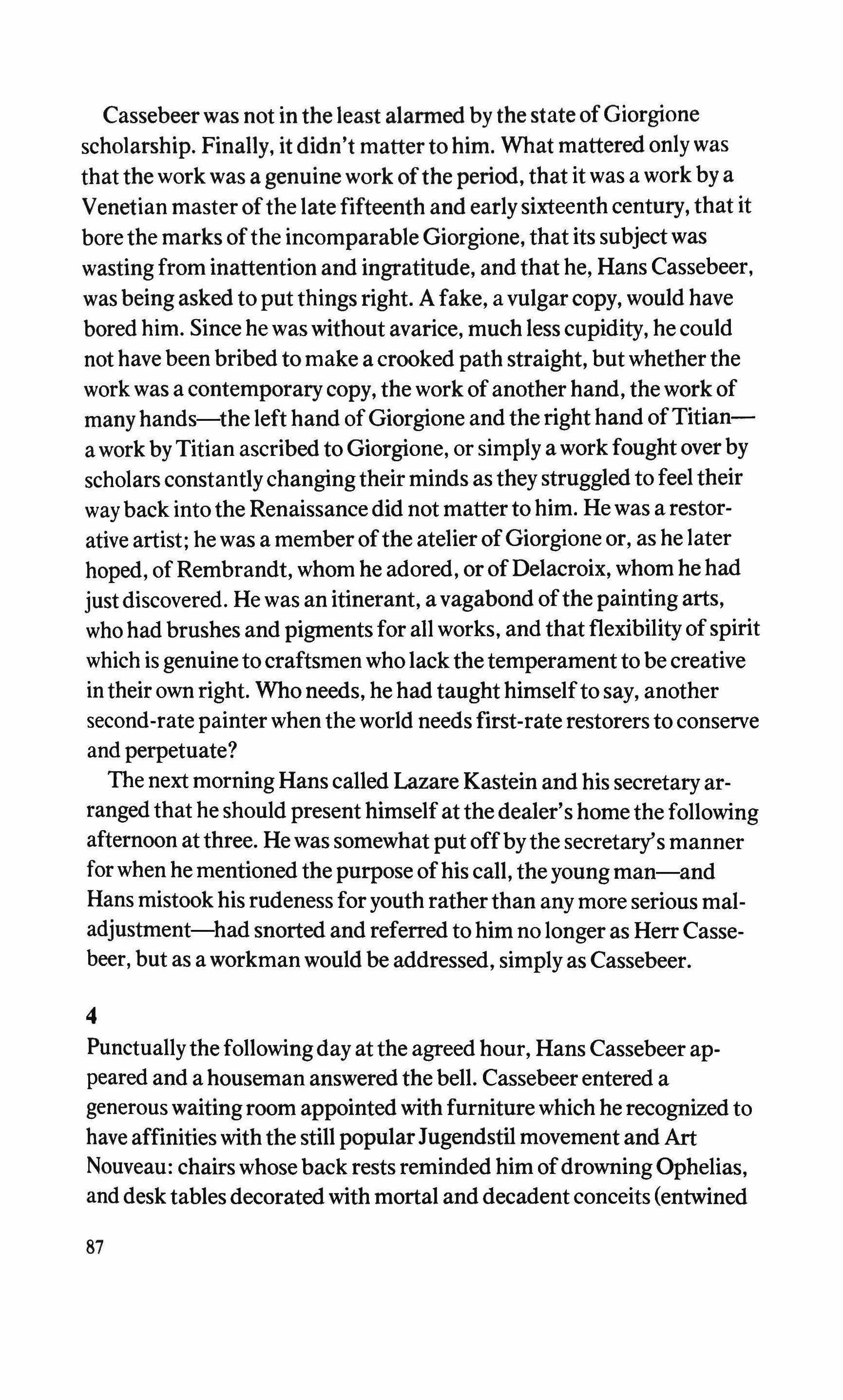
Cassebeer was not in the least alarmed by the state ofGiorgione scholarship. Finally, it didn't matter to him. What mattered only was that the work was a genuine work ofthe period, that it was a work by a Venetian master ofthe latefifteenth and earlysixteenth century, that it bore the marks ofthe incomparableGiorgione, that its subject was wasting from inattention and ingratitude, and that he, Hans Cassebeer, was being asked to putthingsright. A fake, a vulgar copy, would have bored him. Since he was without avarice, much less cupidity, he could not have been bribed to make a crooked path straight, but whether the work was a contemporary copy, the work ofanother hand, the work of many hands-the left hand ofGiorgione and the right hand ofTitiana work byTitian ascribed to Giorgione, or simply a work fought over by scholars constantlychangingtheir minds as theystruggled to feel their way back intothe Renaissance did not matter to him. He was a restorative artist; he was a memberofthe atelier ofGiorgione or, as he later hoped, of Rembrandt, whom he adored, or of Delacroix, whom he had justdiscovered. He was an itinerant, a vagabond ofthe painting arts, who had brushes and pigments for all works, and that flexibility ofspirit which is genuine to craftsmen wholack thetemperament to be creative in their own right. Who needs, he had taught himselfto say, another second-rate painter when the world needs first-rate restorers to conserve and perpetuate?
The next morning Hans called Lazare Kastein and his secretary arranged that he should present himself at the dealer's home the following afternoon at three. He was somewhat put offbythe secretary's manner forwhen he mentioned the purpose ofhis call, theyoung man-and Hans mistook his rudeness foryouth ratherthan any more serious maladjustment-had snorted and referred to him no longer as Herr Cassebeer, but as a workman would be addressed, simply as Cassebeer.
4
Punctuallythe followingday at the agreed hour, Hans Cassebeer appeared and a houseman answered the bell. Cassebeer entered a generous waiting room appointed with furniture which he recognized to have affinities with the still popularJugendstil movement and Art Nouveau: chairs whose back rests reminded him ofdrowningOphelias, and desk tables decorated with mortal and decadent conceits (entwined
87
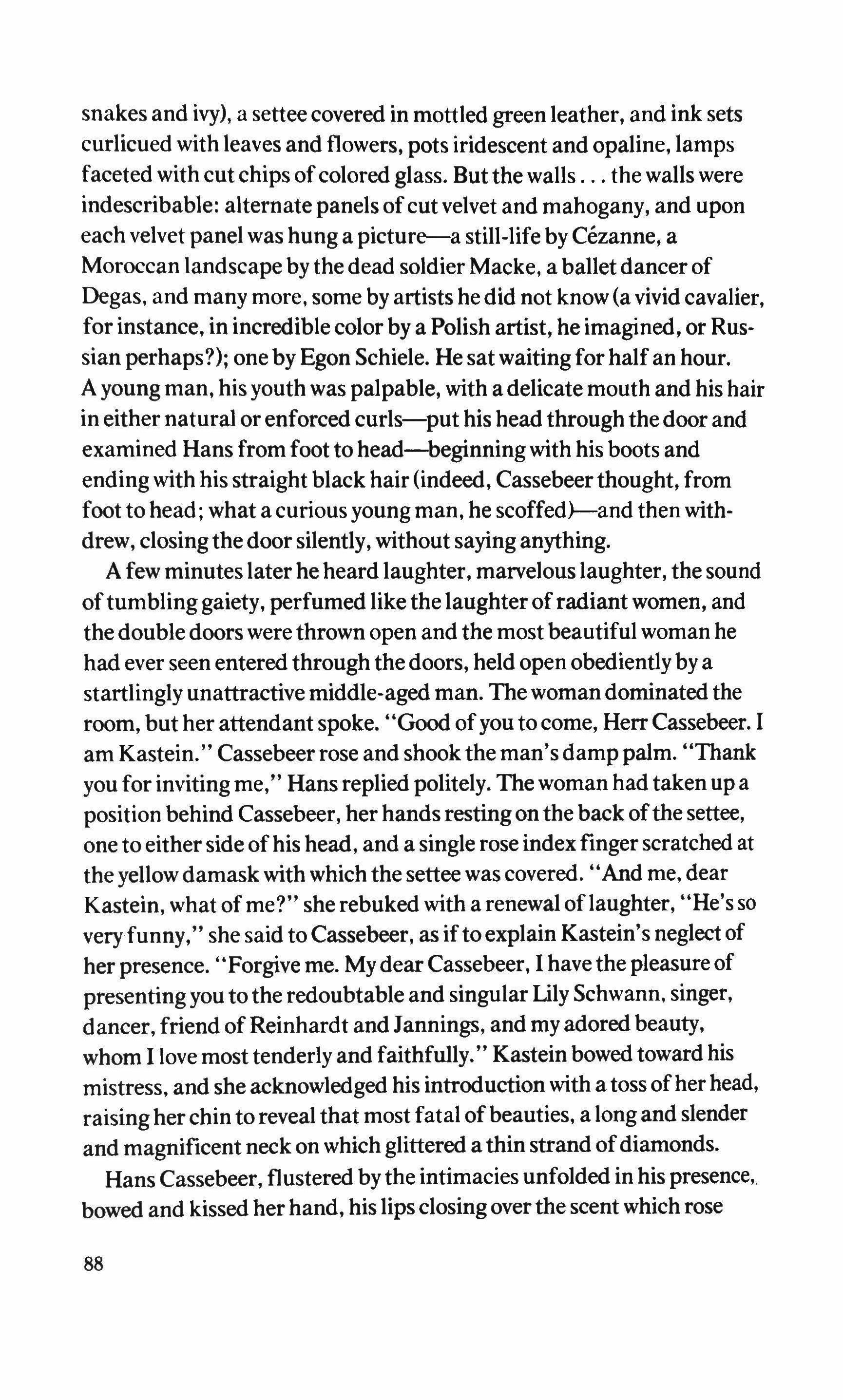
snakes and ivy), a settee covered in mottled green leather, and ink sets curlicued with leaves and flowers, pots iridescent and opaline, lamps faceted with cut chips ofcolored glass. Butthe walls the walls were indescribable: alternate panels ofcut velvet and mahogany, and upon each velvet panel was hung a picture-a still-life byCezanne, a Moroccan landscapeby the dead soldier Macke, a ballet dancer of Degas, and many more, some by artists he did not know(a vivid cavalier, for instance, in incredible color by a Polish artist, he imagined, or Russian perhaps?); one byEgon Schiele. He sat waiting for half an hour. A young man, his youth was palpable, with a delicate mouth and his hair in either natural or enforced curls-put his head through thedoor and examined Hans from foot to head-beginning with his boots and ending with his straight black hair (indeed, Cassebeer thought, from foot to head; what a curious young man, he scoffed++and then withdrew, closingthe door silently, without sayinganything.
A few minutes later he heard laughter, marvelous laughter, the sound oftumblinggaiety, perfumed likethe laughter ofradiant women, and the double doors were thrown open and the most beautiful woman he had ever seen entered through the doors, held open obedientlyby a startlingly unattractive middle-aged man. The woman dominated the room, but her attendant spoke. "Good ofyou to come, Herr Cassebeer. I am Kastein." Cassebeer rose and shook the man's damppalm. "Thank you for invitingme," Hans repliedpolitely. The woman had taken up a position behind Cassebeer, her hands resting on the back ofthe settee, one to either side ofhis head, and a single rose index finger scratched at theyellowdamask with which the settee was covered. "And me, dear Kastein, what ofme?" she rebuked with a renewal oflaughter, "He's so very funny," she said to Cassebeer, as iftoexplain Kastein's neglect of her presence. "Forgive me. Mydear Cassebeer, I have the pleasure of presenting you to the redoubtable and singularLily Schwann, singer, dancer, friend ofReinhardt and Jannings, and my adored beauty, whom I love most tenderly and faithfully." Kastein bowed toward his mistress, and she acknowledged his introduction with a toss ofherhead, raising her chin to reveal that most fatal ofbeauties, a long and slender and magnificent neck on which glittered a thin strand ofdiamonds.
Hans Cassebeer, flustered bythe intimacies unfolded in his presence, bowed and kissed her hand, his lipsclosing over the scent which rose
88
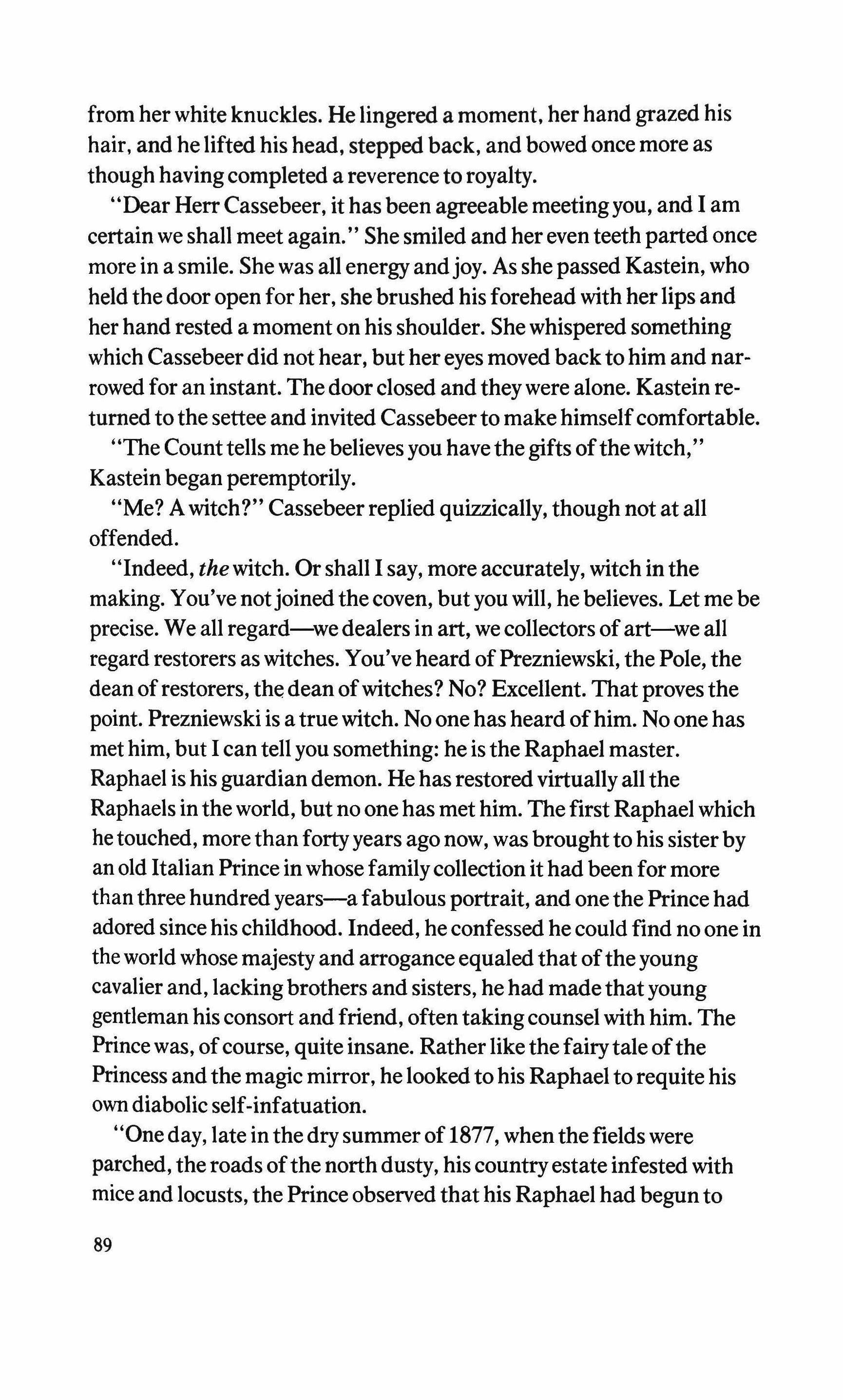
from her white knuckles. He lingered a moment, her hand grazed his hair, and he lifted his head, stepped back, and bowed once more as thoughhavingcompleted a reverence to royalty
Dear Herr Cassebeer, it has been agreeablemeetingyou, and I am certain we shall meet again." She smiled and her even teeth parted once more in a smile. She was all energy andjoy. As she passed Kastein, who held the door open for her, she brushed his forehead with herlips and her hand rested a moment on his shoulder. She whispered something which Cassebeerdid not hear, but her eyes moved back to him and narrowed for an instant. The door closed and they were alone. Kastein returned to the settee and invited Cassebeer to make himselfcomfortable.
"The Counttells me he believes you havethegifts ofthewitch," Kastein beganperemptorily.
"Me? Awitch?" Cassebeer replied quizzically, though not at all offended.
"Indeed, thewitch. Or shall I say, more accurately, witch in the making. You've notjoined the coven, but you will, he believes. Let me be precise. We all regard-wedealers in art, we collectors of art-we all regard restorers as witches. You've heard of Prezniewski, the Pole, the dean ofrestorers, the dean ofwitches? No? Excellent. That proves the point. Prezniewski is a true witch. No one has heard ofhim. No one has met him, but I can tell you something: he is the Raphael master. Raphael is his guardian demon. He has restored virtuallyall the Raphaels in the world, but no one has met him. The first Raphael which hetouched, more than fortyyears ago now, was broughtto his sisterby an old Italian Prince in whose familycollection it had been for more than three hundred years-a fabulous portrait, and one the Prince had adored since his childhood. Indeed, he confessed he could find no one in the world whose majesty and arrogance equaled that ofthe young cavalier and, lackingbrothers and sisters, he had made that young gentleman his consort and friend, often takingcounsel with him. The Prince was, ofcourse, quite insane. Rather like thefairytale ofthe Princess and the magic mirror, he looked to his Raphael to requite his own diabolic self-infatuation.
"One day, late in the dry summer of 1877, when thefields were parched, the roads ofthe north dusty, his country estate infested with mice and locusts, the Prince observed that his Raphael had begun to
89

peel. The greens in the background ofthe canvas, and the rose pinks in the doublet ofthe cavalier, obviouslyresponsive to the deadly sun ofthat summer, gave up their struggle to adhere and began to peel away. The darker colors, the shining blacks of night which surrounded the subject, held firm; onlythe lighter areas were afflicted. Prezniewski had settled in Florence with his sister several months earlier and had busied himself with smalljobs ofcleaning and freshening some mannerist pictures in the Pitti. He had heard ofthe Prince's predicament and knew, since he was the only restorer in Florence at the time, that the Prince would seek him out. In due course, the Prince presented his card and requested that Prezniewski visit him at his estate. Prezniewski sent his sisterwith a brief but uncompromising message. He would come, but only on the condition that he met no one, that he was neither seen nor interviewed, that the picture be placed in an empty room from which all light but that from a single window had been excluded, and that, should he undertake to restore the work, he be allowed to determine the hours and the fee without negotiation. The Prince, for obvious reasons, had no choice but to accept.
Prieznewski worked never more than three hours a day, arrivingby coach in the late afternoon and departing at nightfall. The restoration was completed in seven months, and the Prince was charged a considerable sum which was still modest for the achievement. The Prince returned to his beloved and Prezniewski was launched. What was it, all this shrouding and mystery? We modems would call it style, perhaps salesmanship, but I think it was something else. The restorer's art is alchemical. Is it any different from the distillation ofgold to be able to make a Rembrandt cloak, a Virgin'sdrapery, the green of a velvet not simply resemble but resume the actual life ofthe work? The restorer is a vitalizer, a spiritual elixir ofculture, and hence a witch. So, my dear fellow, I ask you, are you on your road to witchcraft?"
Cassebeer had listened to Kastein'sstorywith utter fascination; for he could not help but regard Prezniewski as a pretentious Pole and Kastein as a necromancer who undoubtedly lovedthedramaofpictures more than he loved the pictures themselves. But Kastein spokewith a spittled rapidity and enthusiasmwhich could not but impressthe lean and somewhat austere young Cassebeer. When Kastein stopped, Cassebeer's eyes widened in amazement, for he realized at that instant, then.
90
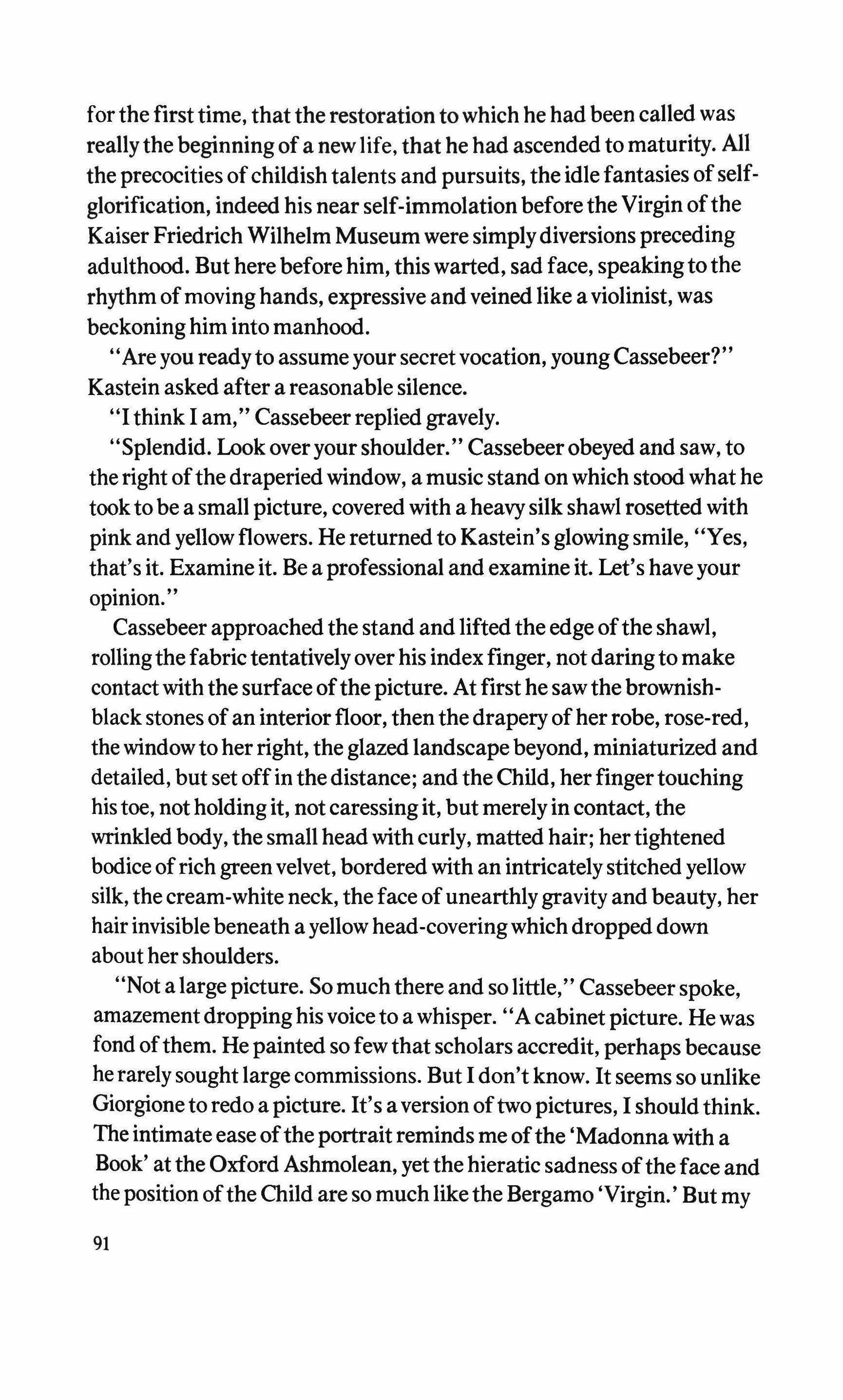
forthe firsttime, thatthe restoration to which he had been called was reallythe beginning of a new life, that he had ascended to maturity. All the precocities ofchildish talents and pursuits, the idle fantasies ofselfglorification, indeed his near self-immolation before the Virgin ofthe Kaiser Friedrich Wilhelm Museum were simplydiversions preceding adulthood. But here before him, this warted, sad face, speakingto the rhythm ofmovinghands, expressive and veined like a violinist, was beckoning him into manhood.
Are you readyto assume your secret vocation, young Cassebeer?" Kastein asked after a reasonable silence.
"I think I am," Cassebeer repliedgravely.
"Splendid. Look over your shoulder." Cassebeer obeyed and saw, to theright ofthe draperiedwindow, a music stand on which stood what he tookto be a small picture, covered with a heavysilk shawl rosetted with pink and yellowflowers. He returned to Kastein's glowingsmile, "Yes, that's it. Examine it. Be a professional and examine it. Let's have your opinion."
Cassebeer approached the stand and lifted the edge ofthe shawl, rollingthefabrictentatively over his indexfinger, not daringto make contact with the surface ofthe picture. At first he saw the brownishblack stones of an interiorfloor, thenthe drapery ofherrobe, rose-red, the windowto her right, the glazedlandscapebeyond, miniaturized and detailed, but set offin thedistance; and the Child, her fingertouching his toe, not holdingit, not caressingit, but merely in contact, the wrinkled body, the small head with curly, matted hair; hertightened bodice ofrich greenvelvet, bordered with an intricately stitched yellow silk, the cream-white neck, the face of unearthlygravity and beauty, her hairinvisible beneath a yellow head-coveringwhich dropped down about her shoulders.
"Not a largepicture. So much there and so little," Cassebeer spoke, amazement dropping hisvoice to a whisper. "A cabinet picture. He was fond ofthem. He painted so fewthat scholars accredit, perhaps because he rarelysoughtlarge commissions. But I don't know. It seems so unlike Giorgione to redo a picture. It's a version oftwo pictures, I should think. The intimate ease oftheportrait reminds me ofthe 'Madonnawith a Book' at the Oxford Ashmolean, yetthe hieratic sadness oftheface and the position ofthe Child are so much likethe Bergamo 'Virgin.' But my
91
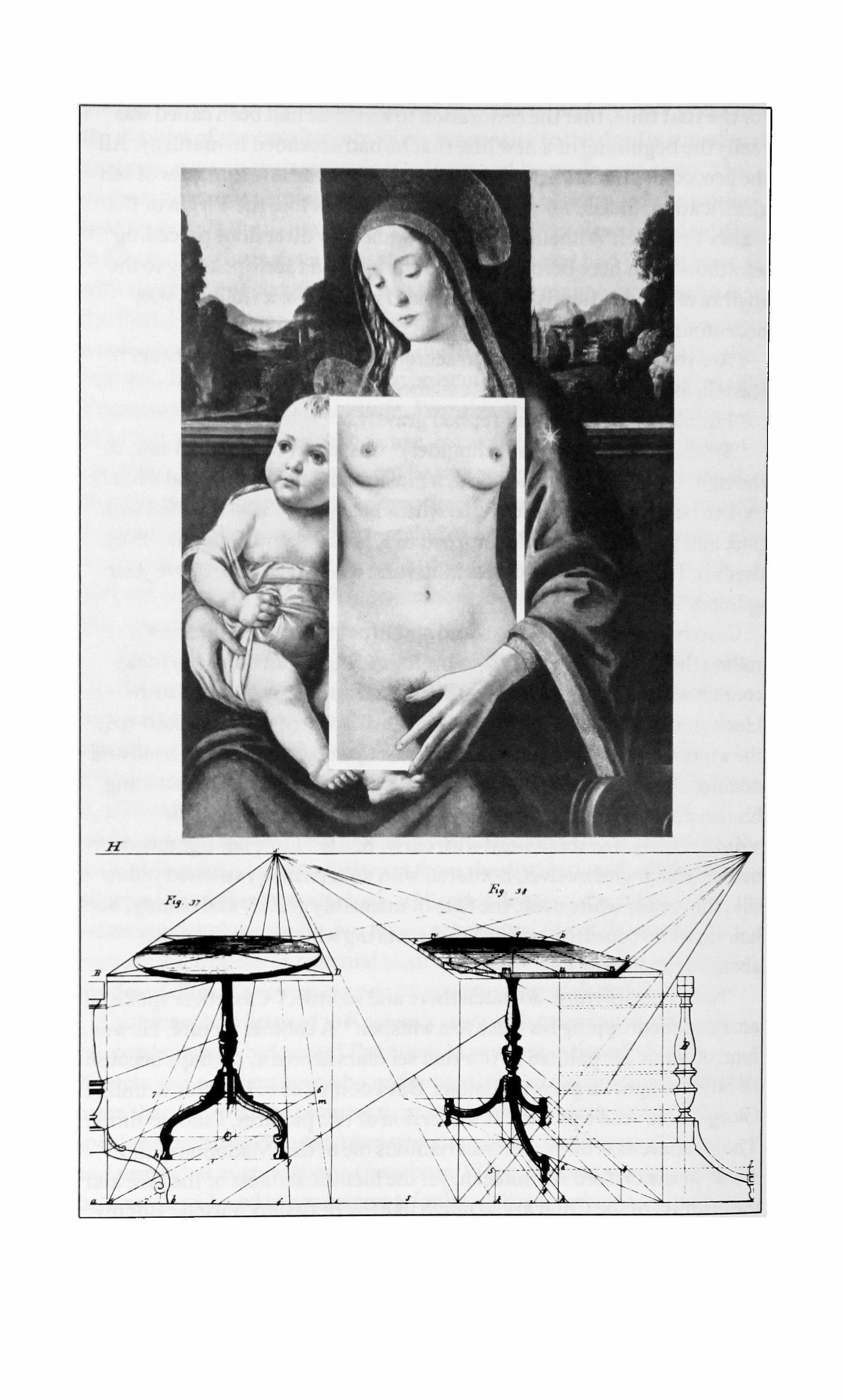
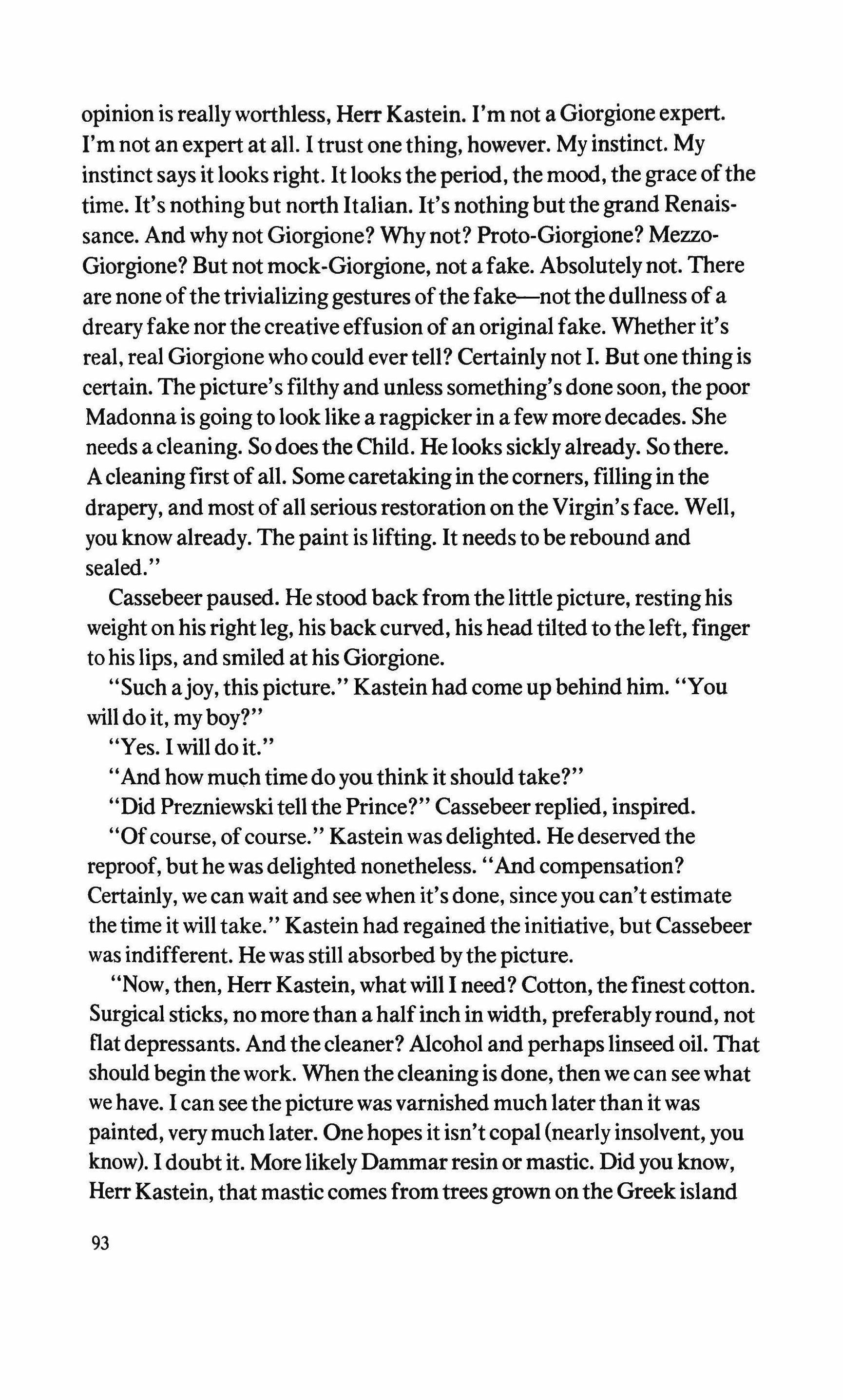
opinion is reallyworthless, Herr Kastein. I'm not a Giorgioneexpert. I'm not an expert at all. I trust one thing, however. My instinct. My instinct says it looks right. It looks the period, the mood, the grace ofthe time. It's nothingbut north Italian. It's nothing butthe grand Renaissance. And why not Giorgione? Whynot? Proto-Giorgione? MezzoGiorgione? But not mock-Giorgione, not a fake. Absolutely not. There are none ofthe trivializinggestures ofthe fake-not the dullness of a drearyfake nor the creative effusion of an original fake. Whether it's real. real Giorgione who could ever tell? Certainly not I. But one thing is certain. The picture'sfilthy and unless something's done soon, the poor Madonna is going to look like a ragpicker in a few more decades. She needs a cleaning. So does the Child. He looks sicklyalready. Sothere. Acleaning first of all. Some caretaking inthe corners, filling inthe drapery, and most of all serious restoration on the Virgin's face. Well, you know already. The paint is lifting. It needs to be rebound and sealed."
Cassebeer paused. He stood back from the little picture, resting his weight on his rightleg, his back curved, his head tilted to the left, finger to his lips, and smiled at his Giorgione.
"Such ajoy, this picture." Kastein had come up behind him. "You will do it, myboy?"
Yes. I will do it.
"And how much timedo youthink it should take?"
"Did Prezniewskitell the Prince?" Cassebeer replied, inspired.
"Ofcourse, ofcourse." Kastein was delighted. He deserved the reproof, but he was delighted nonetheless. "And compensation? Certainly, we can wait and see when it's done, sinceyou can't estimate the time it will take." Kastein had regained the initiative, but Cassebeer was indifferent. He was still absorbed bythe picture.
"Now, then, Herr Kastein, what will I need? Cotton, thefinest cotton. Surgical sticks, no more than a halfinch inwidth, preferablyround, not flat depressants. And the cleaner? Alcohol and perhaps linseed oil. That should begin the work. When thecleaningisdone, then we can see what we have. I can see the picture was varnished much laterthan it was painted, very much later. One hopes it isn't copal(nearlyinsolvent, you know). I doubt it. More likely Dammarresin or mastic. Did you know, Herr Kastein, that mastic comes fromtrees grown on the Greek island
93
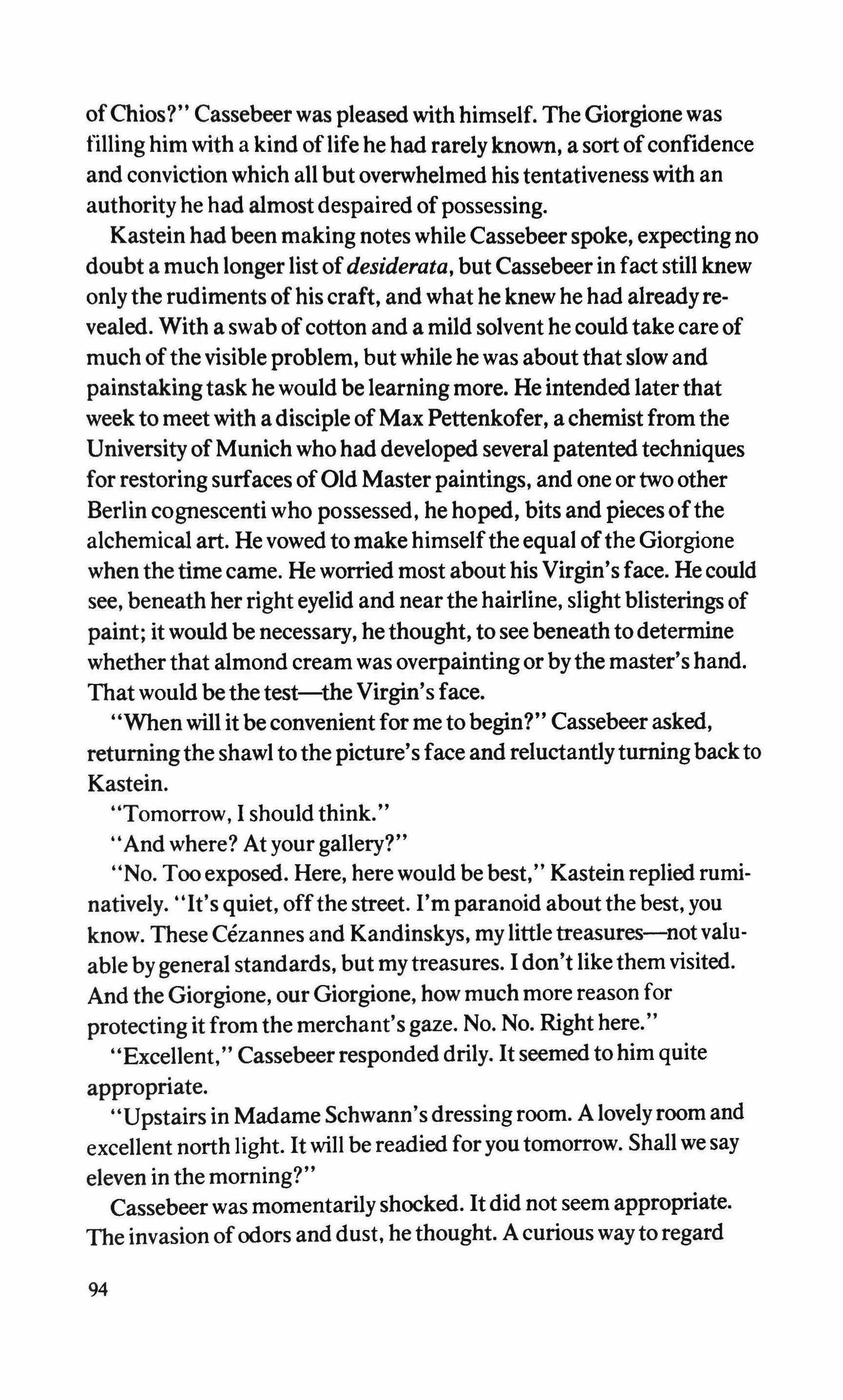
ofChios?" Cassebeer was pleased with himself. The Giorgione was filling him with a kind oflife he had rarelyknown, a sort ofconfidence and conviction which all but overwhelmed his tentativeness with an authority he had almost despaired ofpossessing.
Kastein had been making notes while Cassebeer spoke, expecting no doubt a much longer list ofdesiderata, but Cassebeer in fact still knew onlythe rudiments ofhis craft, and what he knew he had already revealed. With a swab ofcotton and a mild solvent he could take care of much ofthe visible problem, but while he was about that slow and painstakingtask he would be learning more. He intended laterthat week to meet with a disciple ofMax Pettenkofer, a chemist from the University ofMunich who had developed several patentedtechniques for restoring surfaces ofOld Master paintings, and one or two other Berlin cognescenti who possessed, he hoped, bits and piecesofthe alchemical art. He vowed to make himselfthe equal ofthe Giorgione when the time came. He worried most about his Virgin's face. He could see, beneath her righteyelid and near the hairline, slightblisterings of paint; it would be necessary, hethought, to see beneath to determine whetherthat almond cream was overpainting or bythe master's hand. That would be the test-the Virgin's face.
"When will itbe convenient for me to begin?" Cassebeer asked, returningthe shawl to the picture's face and reluctantlyturningback to Kastein.
"Tomorrow, I should think."
.• And where? At your gallery?"
No. Too exposed. Here, here would be best," Kastein replied ruminatively. "It's quiet, offthe street. I'm paranoid aboutthe best, you know. These Cezannes and Kandinskys, my little treasures-not valuable bygeneral standards, but my treasures. I don't like them visited. And the Giorgione, our Giorgione, how much more reason for protecting it from the merchant's gaze. No. No. Right here."
"Excellent," Cassebeer respondeddrily. It seemed to him quite appropriate.
"Upstairs in Madame Schwarm's dressing room. A lovely room and excellent north light. It will be readied foryou tomorrow. Shall we say eleven in the morning?"
Cassebeer was momentarilyshocked. It did not seem appropriate. The invasion ofodors and dust, he thought. A curious way to regard
94
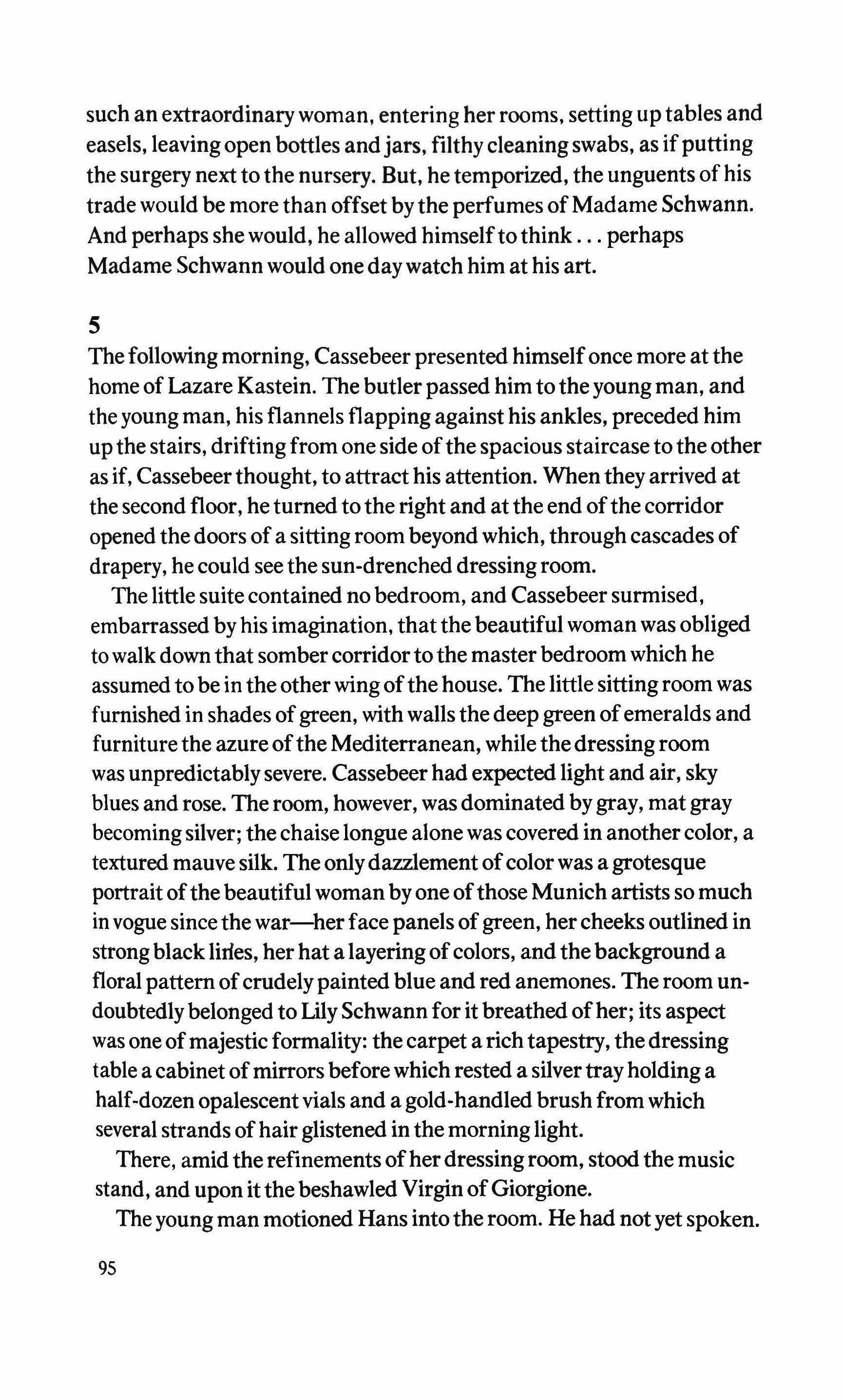
such an extraordinary woman, entering her rooms, setting up tables and easels, leaving open bottles andjars, filthycleaningswabs, as ifputting the surgery next to the nursery. But, he temporized, the unguents of his trade would be more than offset bythe perfumes of Madame Schwann. And perhaps she would, he allowed himselfto think perhaps Madame Schwarm would one daywatch him at his art.
5
The followingmorning, Cassebeer presented himself once more at the home of Lazare Kastein. The butler passed him to theyoung man, and the young man, his flannels flappingagainst his ankles, preceded him up the stairs, drifting from one side ofthe spacious staircase to the other as if, Cassebeer thought, to attract his attention. When they arrived at the second floor, he turned to the right and at the end ofthe corridor opened the doors of a sitting room beyondwhich, through cascades of drapery, hecould see the sun-drenched dressing room.
The little suite contained no bedroom, and Cassebeer surmised, embarrassed by his imagination, that the beautiful woman was obliged to walkdown that somber corridor tothe master bedroom which he assumed to be in the other wingofthe house. The little sitting room was furnished in shades ofgreen, with walls the deep green ofemeralds and furniture the azure ofthe Mediterranean, while thedressing room was unpredictably severe. Cassebeerhad expectedlight and air, sky blues and rose. The room, however, was dominated by gray, mat gray becomingsilver; the chaise longue alone was covered in anothercolor, a textured mauve silk. The onlydazzlement ofcolor was a grotesque portrait ofthebeautiful woman by one ofthose Munich artists so much in vogue since the war-her face panels of green, hercheeks outlined in strong blacklirles, herhat a layeringofcolors, and thebackground a floral pattern ofcrudelypainted blue and red anemones. The room undoubtedlybelonged to Lily Schwannfor it breathed ofher; its aspect was one ofmajesticformality: the carpet a rich tapestry, thedressing table a cabinet ofmirrors beforewhich rested a silver trayholding a half-dozen opalescent vials and a gold-handled brush from which several strands ofhair glistened in themorninglight. There, amid therefinements ofherdressing room, stood the music stand, and upon itthe beshawled Virgin ofGiorgione.
The young man motioned Hans intothe room. He had notyet spoken.
9S
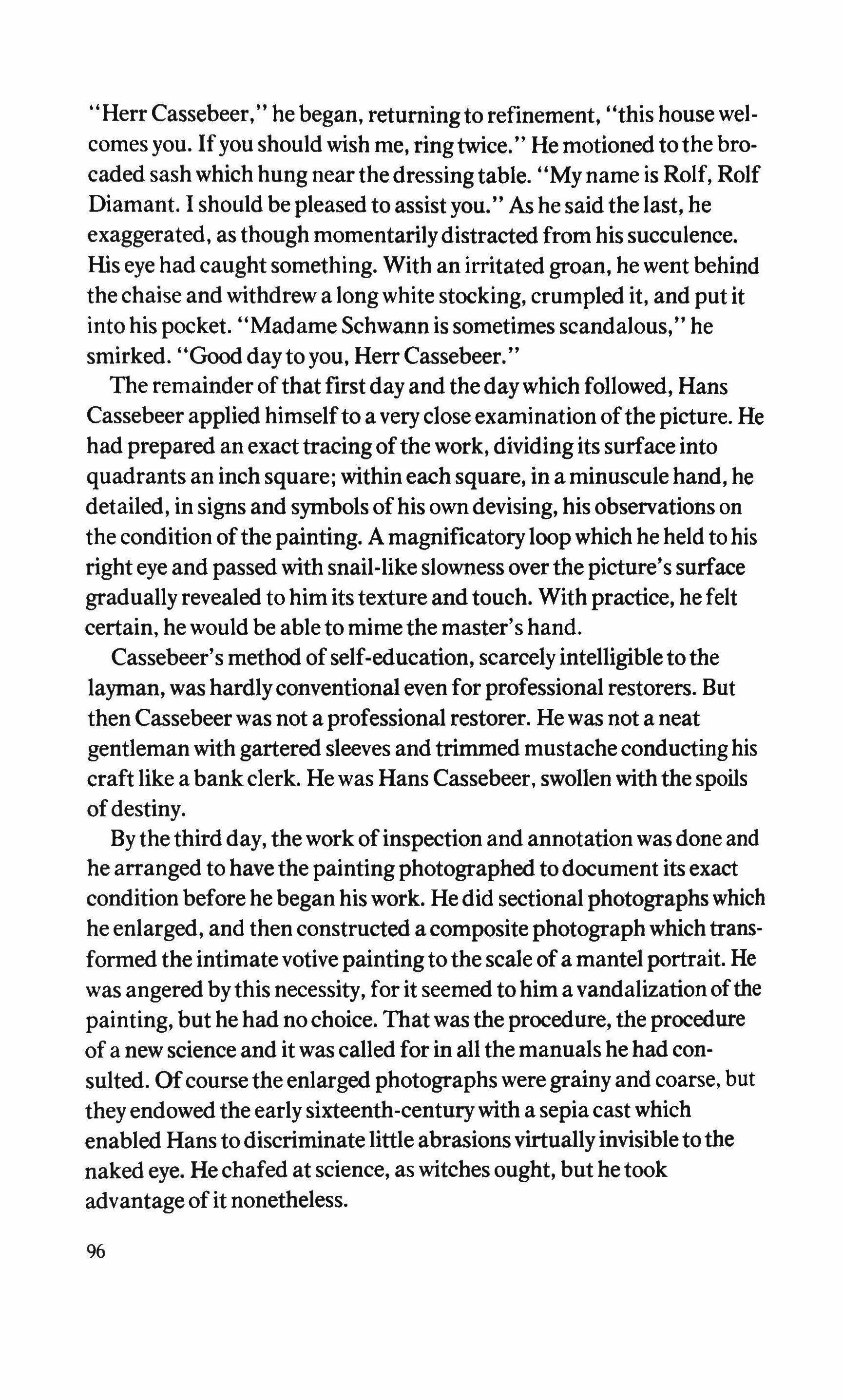
Herr Cassebeer," he began, returningto refinement, "this house welcomes you. Ifyou should wish me, ringtwice." He motioned to the brocaded sash which hung near thedressingtable. "My name is Rolf, Rolf Diamant. I should be pleased to assist you." As he said the last, he exaggerated, as though momentarilydistracted from his succulence. His eye had caughtsomething. With an irritated groan, he went behind the chaise and withdrew a longwhite stocking, crumpled it, and put it into his pocket. "Madame Schwann is sometimes scandalous," he smirked. "Good day to you, Herr Cassebeer."
The remainder ofthat first day and thedaywhich followed, Hans Cassebeer applied himselfto a very close examination ofthe picture. He had prepared an exact tracingofthe work, dividingits surface into quadrants an inch square; within each square, in a minuscule hand, he detailed, in signs and symbols ofhis own devising, his observations on the condition ofthe painting. A magnificatoryloop which he held to his right eye and passed with snail-like slowness over the picture's surface gradually revealed to him its texture and touch. With practice, he felt certain, hewould be able to mime the master's hand.
Cassebeer's method ofself-education, scarcelyintelligible to the layman, was hardlyconventional even for professional restorers. But then Cassebeer was not a professional restorer. He was not a neat gentleman with gartered sleeves and trimmed mustache conductinghis craft like a bankclerk. He was Hans Cassebeer, swollen withthe spoils ofdestiny.
Bythe third day, the work ofinspection and annotation was done and he arranged to have the paintingphotographed to document its exact condition before he began his work. He did sectional photographswhich he enlarged, and then constructed a compositephotograph which transformed the intimatevotive paintingto the scale of a mantel portrait. He was angeredbythis necessity, for it seemed to him a vandalization ofthe painting, but he had no choice. That was the procedure, the procedure of a new science and it was called for in all the manuals he had consulted. Of course the enlarged photographs were grainy and coarse, but theyendowed the earlysixteenth-centurywith a sepia cast which enabled Hans to discriminate little abrasions virtuallyinvisible tothe naked eye. He chafed at science, as witches ought, but he took advantageofit nonetheless.
96
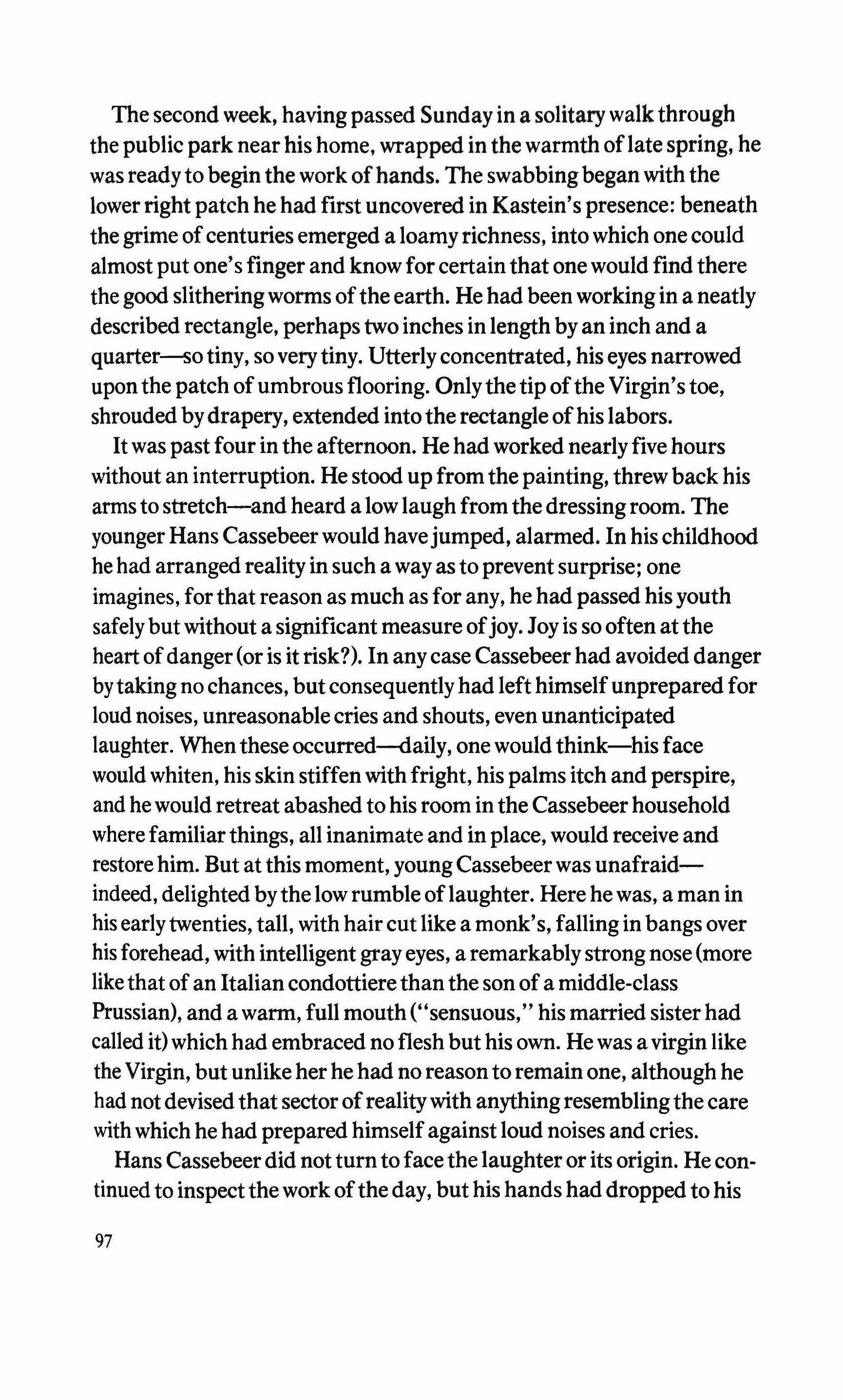
The second week, havingpassed Sunday in a solitary walkthrough the publicpark near his home, wrapped in the warmth oflate spring, he was readyto begin the work ofhands. The swabbingbeganwith the lower rightpatch he had first uncovered in Kastein's presence: beneath the grime ofcenturies emerged a loamyrichness, into which one could almost put one's finger and know forcertain that one would find there thegood slithering worms ofthe earth. He had been workingin a neatly described rectangle, perhaps two inches in lengthby an inch and a quarter-sotiny, so verytiny. Utterlyconcentrated, his eyes narrowed uponthe patch ofumbrous flooring. Onlythetip ofthe Virgin'stoe, shrouded bydrapery, extended intotherectangle ofhis labors. It was past four inthe afternoon. He had worked nearlyfive hours without an interruption. He stood up from the painting, threwback his arms to stretch-and heard a low laugh from the dressing room. The younger Hans Cassebeer would havejumped, alarmed. In his childhood he had arrangedreality in such a way as to preventsurprise; one imagines, for that reason as much as for any, he had passed hisyouth safelybutwithout a significant measure ofjoy. Joyis so often at the heart ofdanger(oris it risk?). In any case Cassebeerhad avoided danger bytaking no chances, butconsequently had left himselfunprepared for loud noises, unreasonablecries and shouts, even unanticipated laughter. When theseoccurred-daily, one would think-his face would whiten, his skin stiffen withfright, his palms itch and perspire, and he would retreat abashed to his room inthe Cassebeer household where familiar things, all inanimate and in place, would receive and restore him. But at this moment, young Cassebeer was unafraidindeed, delightedbythe lowrumble oflaughter. Here he was, a man in his earlytwenties, tall, with hair cut like a monk's, falling in bangs over hisforehead, with intelligent gray eyes, a remarkablystrong nose (more like that of an Italian condottiere thanthe son of a middle-class Prussian), and a warm, full mouth("sensuous," his married sister had called it)which had embraced no flesh but his own. He was a virgin like the Virgin, but unlike herhehad no reason to remain one, although he had not devised that sector ofrealitywith anythingresemblingthe care withwhich he had prepared himselfagainst loud noises and cries. Hans Cassebeer did not turn to facethe laughter or its origin. He continued to inspectthe work ofthe day, but his hands had dropped to his
97
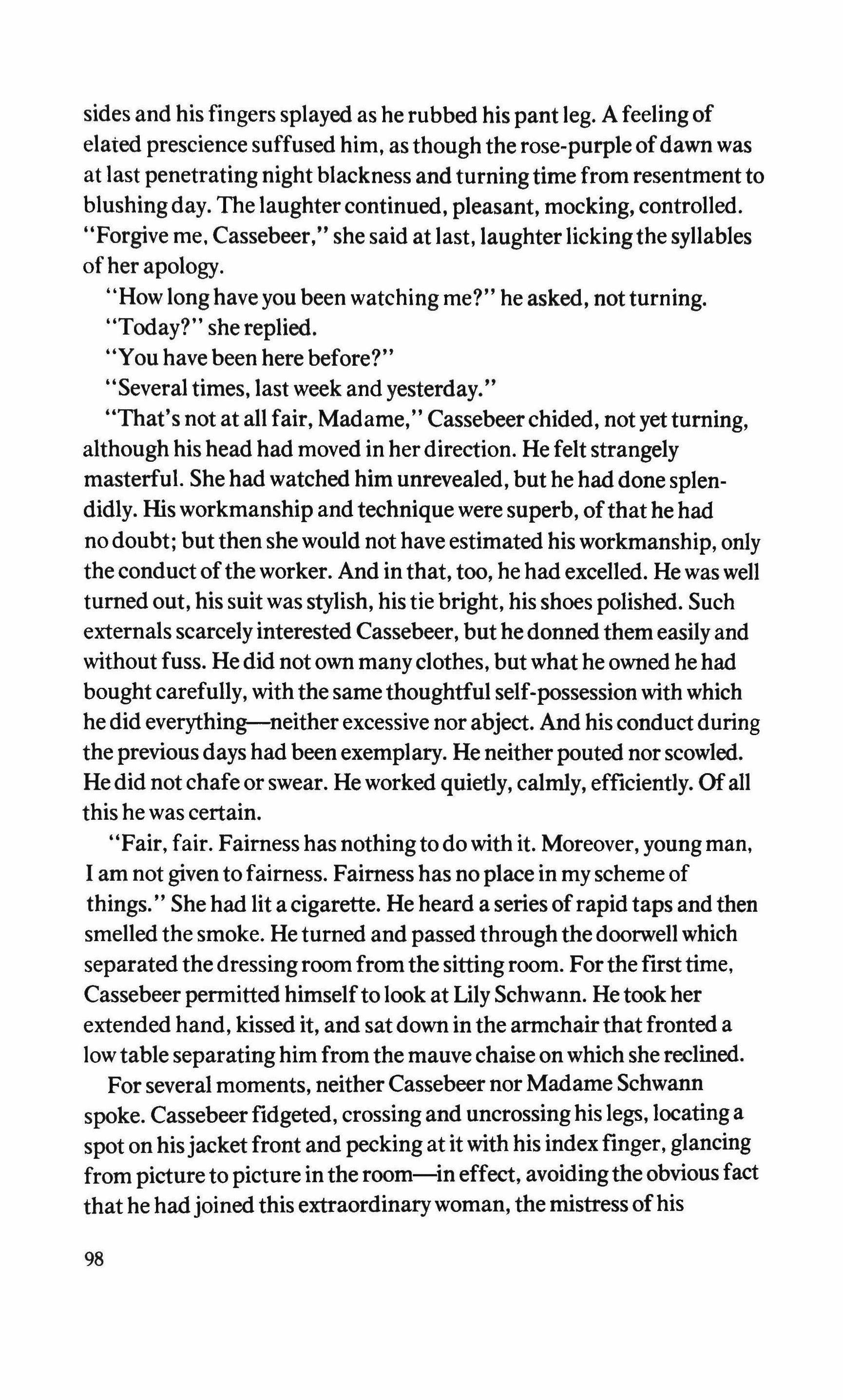
sides and his fingers splayed as he rubbed his pantleg. A feeling of elated prescience suffused him, as though the rose-purple ofdawn was at last penetratingnight blackness and turning time from resentment to blushingday. The laughtercontinued, pleasant, mocking, controlled. "Forgive me. Cassebeer," she said at last, laughterlickingthe syllables ofher apology.
"How longhave you been watching me?" he asked, not turning. "Today?" she replied.
"You have been here before?"
"Several times, last week and yesterday."
"That's not at all fair, Madame," Cassebeer chided, not yetturning, although his head had moved in herdirection. He felt strangely masterful. She had watched him unrevealed, but he had done splendidly. His workmanship and technique were superb, ofthat he had no doubt; but then she would not have estimated his workmanship, only the conduct ofthe worker. And inthat, too, he had excelled. He was well turned out, his suit was stylish, his tie bright, his shoes polished. Such externals scarcelyinterested Cassebeer, but hedonned them easily and without fuss. He did not own manyclothes, but what he owned he had boughtcarefully, with the same thoughtful self-possession with which he did everything--neither excessive nor abject. And his conduct during the previousdays had been exemplary. He neither pouted nor scowled. He did not chafe or swear. Heworked quietly, calmly, efficiently. Ofall this he was certain.
"Fair fair. Fairness has nothing to do with it. Moreover, young man, I am not given to fairness. Fairness has no place in my scheme of things." She had lit a cigarette. He heard a series ofrapid taps and then smelled the smoke. He turned and passedthrough the doorwell which separated the dressing room fromthe sitting room. Forthe firsttime, Cassebeer permitted himselfto look at Lily Schwann. He took her extended hand, kissed it, and sat down in the armchair that fronted a lowtable separating him from the mauve chaise on which she reclined.
For several moments, neither Cassebeer nor Madame Schwann spoke. Cassebeer fidgeted, crossing and uncrossinghis legs, locating a spot on hisjacket front and pecking at it with his indexfinger, glancing from picture to picture in the room-in effect, avoidingthe obvious fact that he hadjoined this extraordinarywoman, the mistress ofhis
98
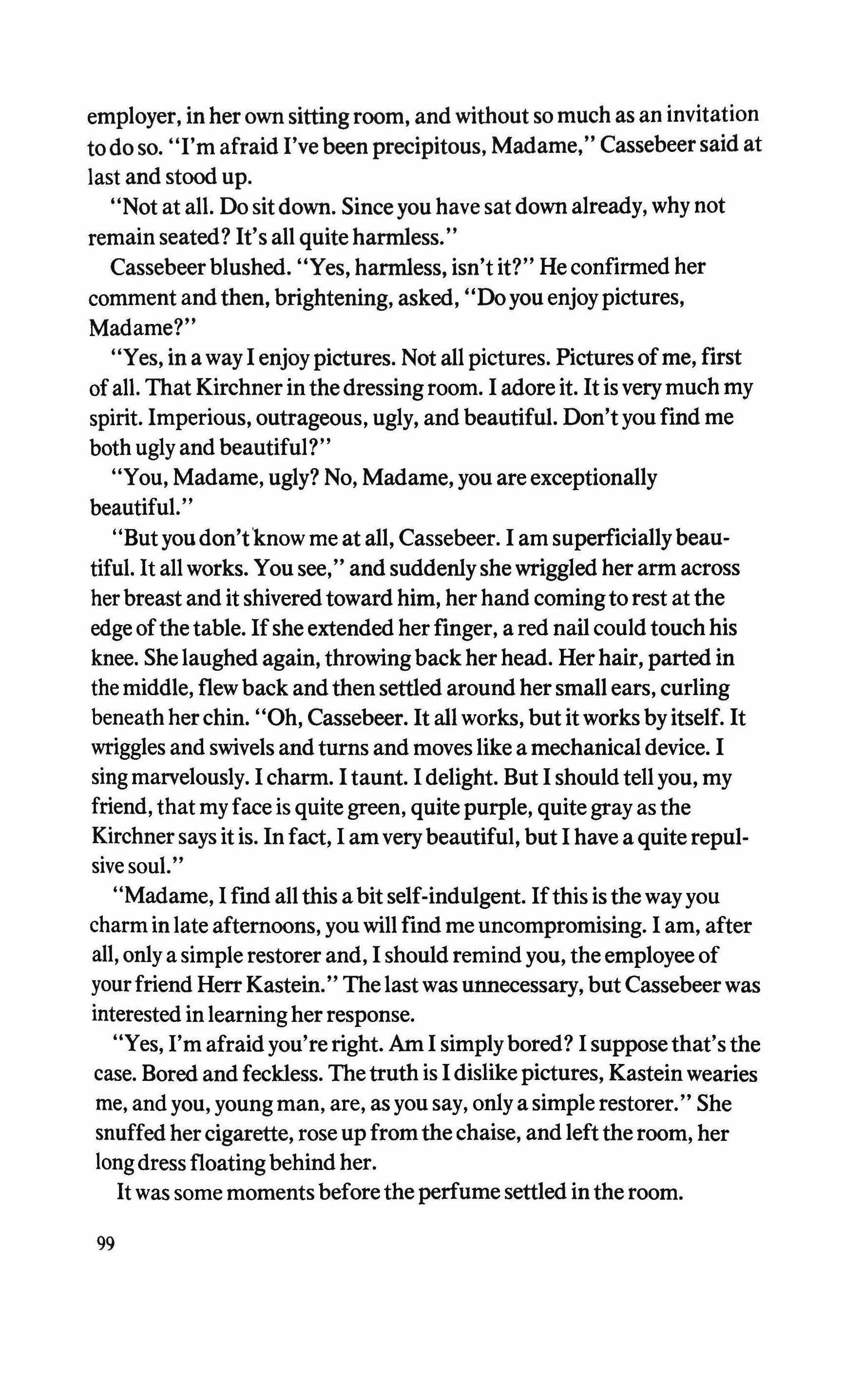
employer, in her own sitting room, and without so much as an invitation to do so. "I'm afraid I've been precipitous, Madame," Cassebeer said at last and stood up.
"Not at all. Do sitdown. Sinceyou have sat down already, why not remain seated? It's all quite harmless."
Cassebeerblushed. "Yes, harmless, isn't it?" He confirmed her comment andthen, brightening, asked, "Doyou enjoypictures, Madame?"
"Yes, in a way I enjoypictures. Not all pictures. Pictures ofme, first ofall. That Kirchner inthedressing room. I adore it. It is verymuch my spirit. Imperious, outrageous, ugly, and beautiful. Don't you find me both ugly and beautiful?"
"You, Madame, ugly? No, Madame, you are exceptionally beautiful. "
"But you don'tknow me at all, Cassebeer. I am superficiallybeautiful. It all works. You see," and suddenlyshe wriggled her arm across herbreast and it shivered toward him, her hand comingto rest at the edge ofthetable. Ifshe extended her finger, a red nail could touch his knee. She laughedagain,throwingback her head. Herhair, parted in the middle, flew back and then settled around hersmall ears, curling beneath herchin. "Oh, Cassebeer. It all works, but it works by itself. It wriggles and swivels and turns and moves like a mechanical device. I singmarvelously. I charm. I taunt. I delight. But I should tell you, my friend, that my face is quite green, quitepurple, quite gray as the Kirchner says it is. In fact, I am verybeautiful, but I have a quiterepulsive soul."
"Madame, I fmd all this a bit self-indulgent. Ifthis is the wayyou charm in late afternoons, you will find me uncompromising. I am, after all, only a simple restorer and, I should remind you, theemployee of yourfriend Herr Kastein." The last was unnecessary, but Cassebeer was interested in learning her response.
"Yes, I'm afraid you'reright. Am I simplybored? Isupposethat's the case. Bored and feckless. Thetruth is I dislikepictures, Kastein wearies me, and you, young man, are, as you say, only a simple restorer." She snuffed hercigarette, rose up fromthe chaise, and leftthe room, her longdress floatingbehind her.
It was some moments beforethe perfume settled in the room.
99
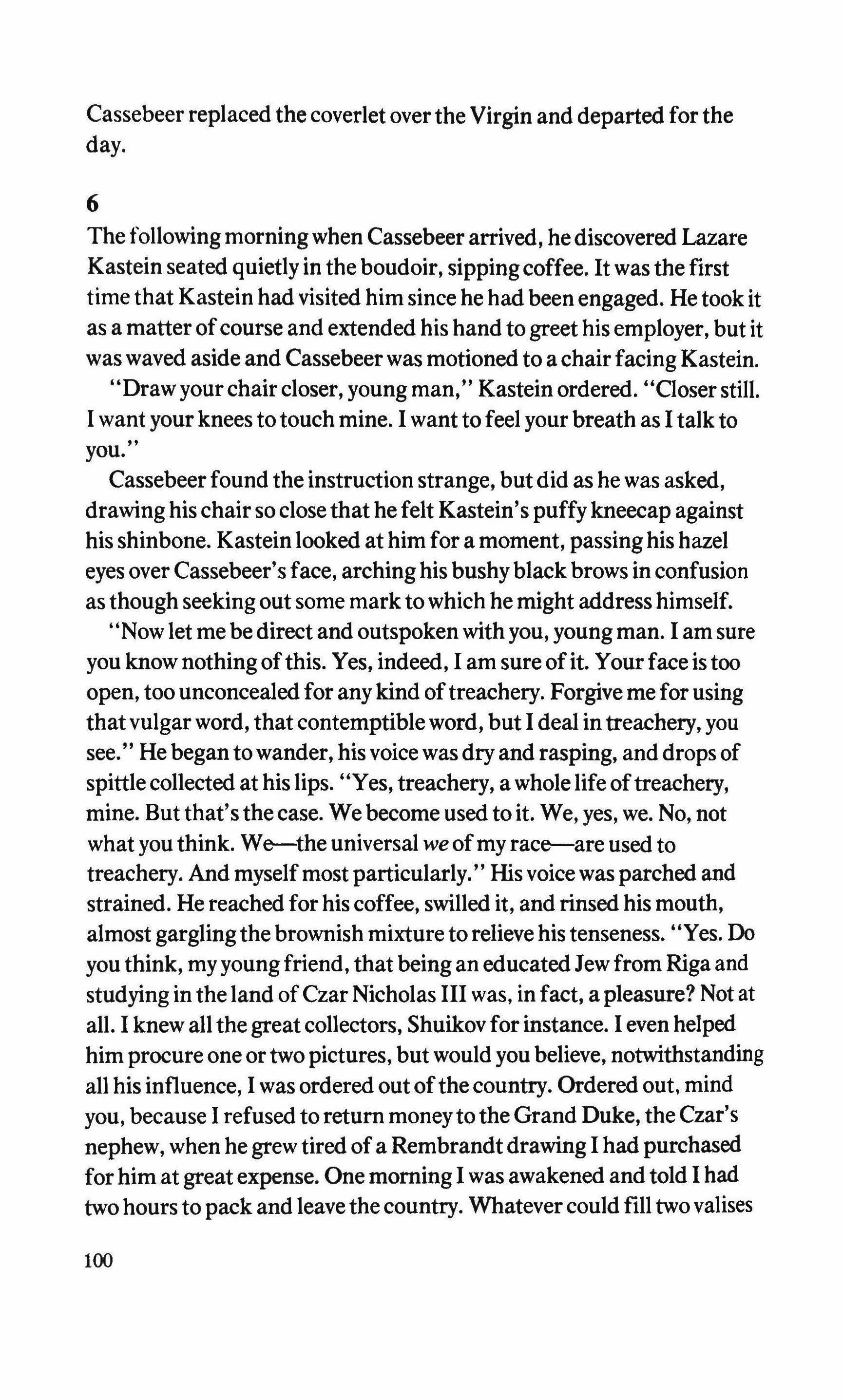
Cassebeer replaced the coverlet over the Virgin and departed for the day.
6
The followingmorningwhen Cassebeer arrived, hediscovered Lazare Kastein seated quietly in the boudoir, sippingcoffee. It was the first time that Kastein had visited him since he had been engaged. He took it as a matter of course and extended his hand to greet his employer, but it was waved aside and Cassebeer was motioned to a chair facing Kastein. "Drawyour chair closer, young man," Kastein ordered. "Closer still. I want your knees to touch mine. I want to feel your breath as I talk to you."
Cassebeerfound the instruction strange, but did as he was asked, drawing his chair so close that he felt Kastein's puffykneecap against his shinbone. Kastein looked at him for a moment, passing his hazel eyes over Cassebeer's face, archinghis bushyblack brows in confusion as though seeking out some mark to which he might address himself. "Now let me be direct and outspoken with you, young man. I am sure you know nothingofthis. Yes, indeed, I am sure ofit. Yourface is too open, too unconcealed for any kind oftreachery. Forgive me for using thatvulgarword, that contemptibleword, but I deal intreachery, you see." He began to wander, his voice was dry and rasping, and drops of spittle collected at his lips. "Yes, treachery, a whole life oftreachery, mine. But that's the case. We become used to it. We, yes, we. No, not what you think. We-the universal we ofmy race-are used to treachery. And myself most particularly." His voice was parched and strained. He reached for his coffee, swilled it, and rinsed his mouth, almost garglingthe brownish mixture to relieve his tenseness. "Yes. Do you think, my young friend, that being an educated Jewfrom Riga and studying in the land ofCzar Nicholas III was, in fact, a pleasure? Not at all. I knew all the greatcollectors, Shuikov for instance. I even helped him procure one or two pictures, but would you believe, notwithstanding all his influence, I was ordered out ofthecountry. Ordered out. mind you, because I refused to return money to the Grand Duke, the Czar's nephew, when he grew tired of a Rembrandt drawing I had purchased forhim at great expense. One morning I was awakened and told I had two hours to pack and leave the country. Whatever could fill two valises 100
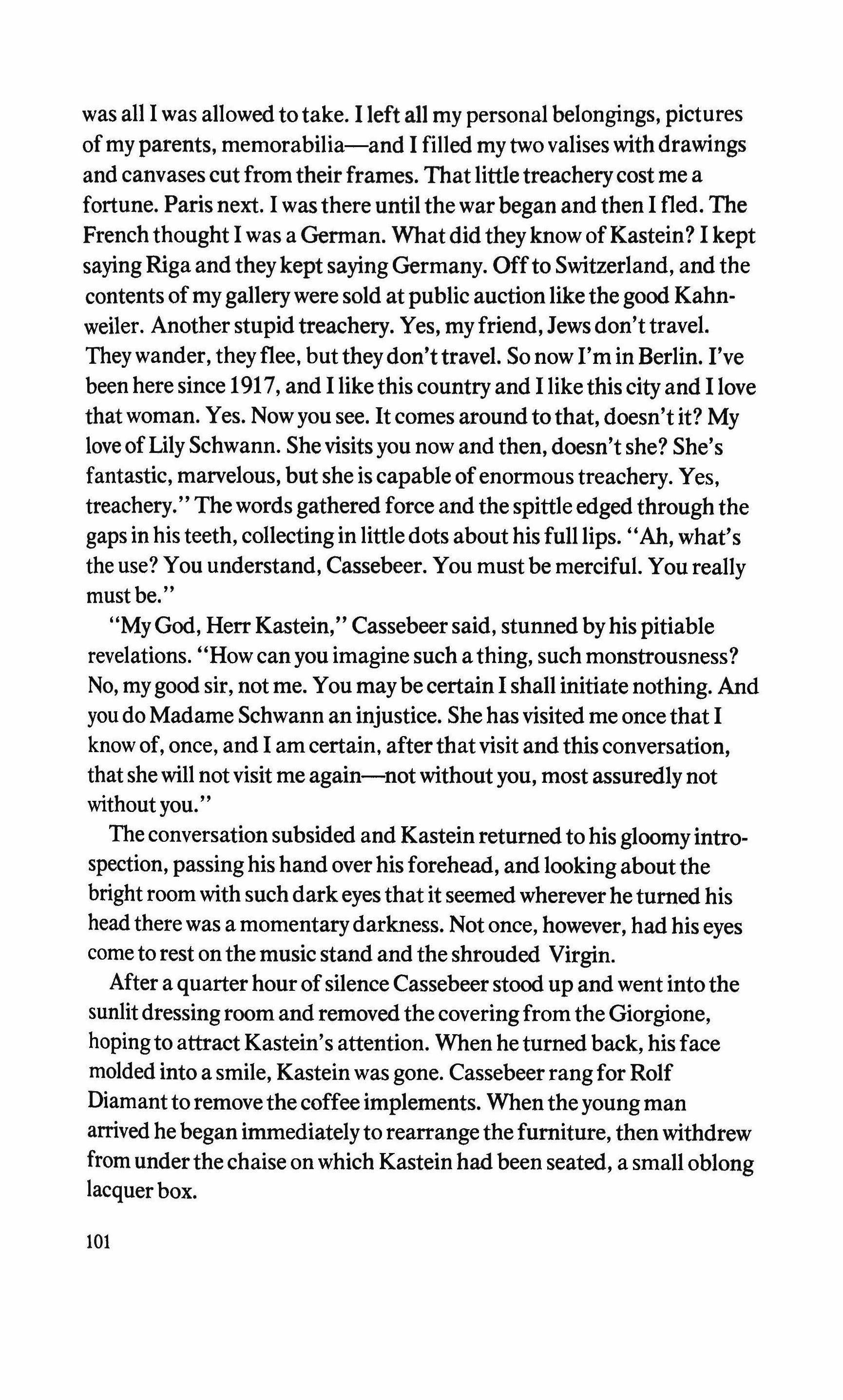
was all I was allowed to take. I left all my personal belongings, pictures of my parents, memorabilia-and I filled my two valises with drawings and canvases cut from their frames. That littletreachery cost me a fortune. Paris next. I was there until the war began and then I fled. The French thought I was a German. What did they know ofKastein? I kept sayingRiga and theykeptsayingGermany. Offto Switzerland, and the contents ofmygallery were sold at public auction like the good Kahnweiler. Another stupidtreachery. Yes, myfriend, Jews don'ttravel. Theywander, theyflee, but theydon'ttravel. So now I'm in Berlin. I've been here since 1917, and I like this country and I like this city and I love that woman. Yes. Nowyou see. It comes around to that, doesn't it? My love of Lily Schwann. She visits you now and then, doesn't she? She's fantastic, marvelous, but she is capable of enormous treachery. Yes, treachery." The words gathered force and the spittleedgedthrough the gaps in his teeth, collecting in littledots about his full lips. "Ah, what's the use? You understand, Cassebeer. You must be merciful. You really must be."
"MyGod, Herr Kastein," Cassebeer said, stunned byhis pitiable revelations. "How can you imagine such a thing, such monstrousness? No, mygood sir, not me. You may becertain I shall initiate nothing. And you do Madame Schwann an injustice. She has visited me once that I know of, once, and I am certain, afterthatvisit and this conversation, that shewill not visit me again-notwithout you, most assuredly not without you."
The conversation subsided and Kastein returned to his gloomyintrospection, passinghis hand over his forehead, and looking about the bright room with such dark eyes that it seemed wherever he turned his head there was a momentarydarkness. Not once, however, had his eyes come to rest on the music stand and the shrouded Virgin.
After a quarter hourofsilence Cassebeer stood up and went intothe sunlitdressing room and removed the coveringfrom the Giorgione, hopingto attract Kastein's attention. When he turned back, his face molded into a smile, Kastein was gone. Cassebeer rang for Rolf Diamant to remove the coffee implements. When the young man arrived he beganimmediately to rearrange the furniture, then withdrew from underthe chaise on which Kastein had been seated, a small oblong lacquer box.
101
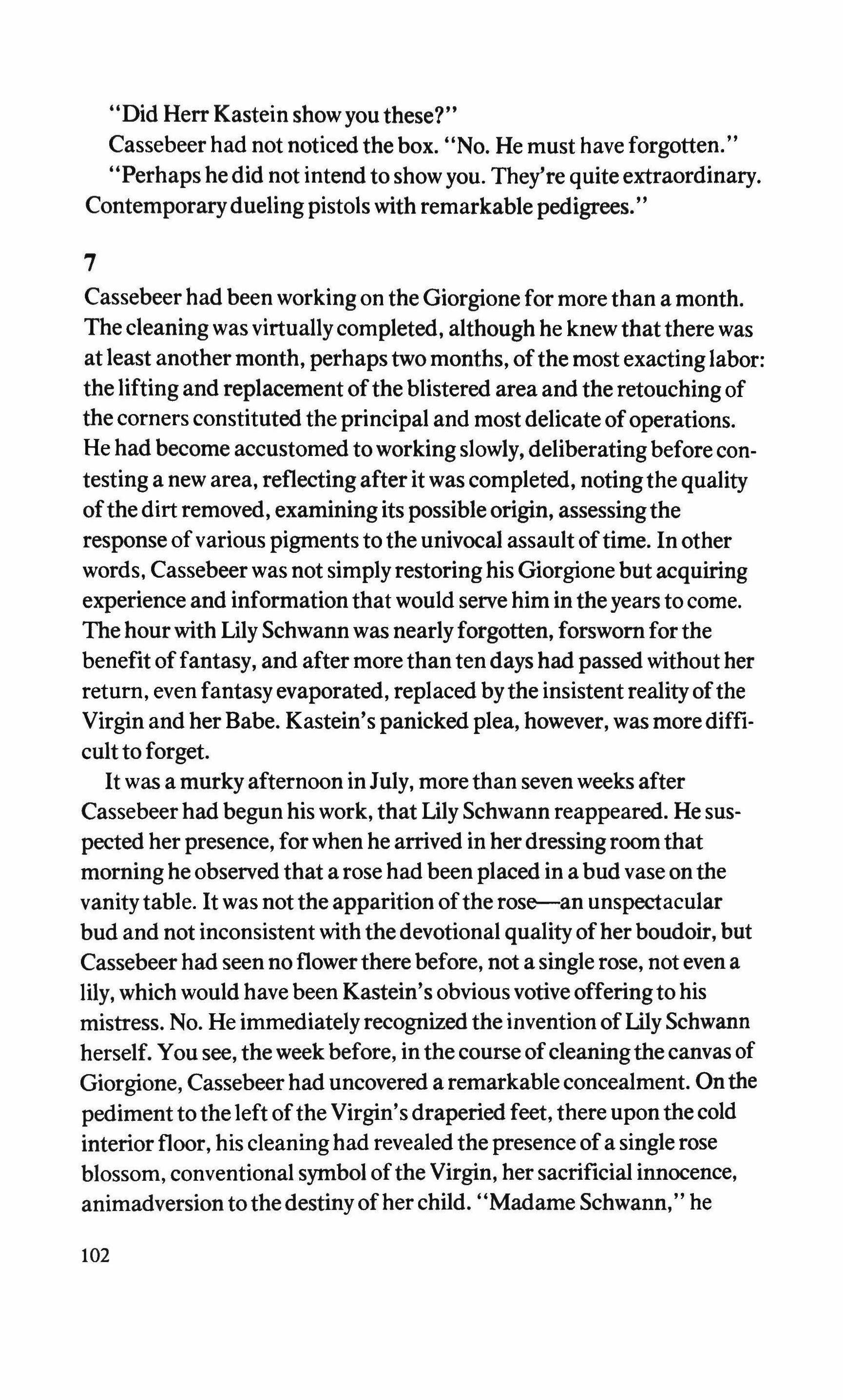
"Did Herr Kastein showyou these?"
Cassebeer had not noticed the box. "No. He must have forgotten."
"Perhaps he did not intend to show you. They're quiteextraordinary.
Contemporaryduelingpistols with remarkable pedigrees."
7
Cassebeer had been working on the Giorgione for more than a month. The cleaning was virtuallycompleted, although he knew thatthere was at least anothermonth, perhaps two months, ofthe most exactinglabor: the lifting and replacement ofthe blistered area and the retouching of the corners constituted the principal and most delicate ofoperations. He had become accustomed to workingslowly,deliberatingbefore contesting a new area, reflectingafter it was completed, notingthe quality ofthe dirt removed, examining its possibleorigin, assessingthe response ofvarious pigments to the univocal assault oftime. In other words, Cassebeer was not simplyrestoringhis Giorgione but acquiring experience and information that would serve him intheyears to come. The hour with Lily Schwann was nearlyforgotten, forsworn forthe benefit offantasy, and after more than ten days had passed without her return, even fantasyevaporated, replacedbythe insistent reality ofthe Virgin and her Babe. Kastein's panickedplea, however, was more difficult to forget.
It was a murky afternoon in July, more than seven weeks after Cassebeer had begun his work, that Lily Schwann reappeared. He suspected her presence, for when he arrived in herdressing room that morning he observed that a rose had been placed in a bud vase on the vanitytable. It was not the apparition ofthe rose-an unspectacular bud and not inconsistent with the devotional quality ofher boudoir, but Cassebeer had seen no flowerthere before, not a single rose, not even a lily, which would have been Kastein's obvious votive offeringto his mistress. No. He immediatelyrecognized the invention ofLily Schwann herself. You see, the week before, inthe course ofcleaningthe canvas of Giorgione, Cassebeer had uncovered a remarkable concealment. Onthe pediment to theleft ofthe Virgin'sdraperied feet, there upon thecold interior floor, his cleaninghad revealed the presence of a single rose blossom, conventional symbol ofthe Virgin, her sacrificial innocence, animadversion to thedestinyofher child. "Madame Schwarm,' he
102
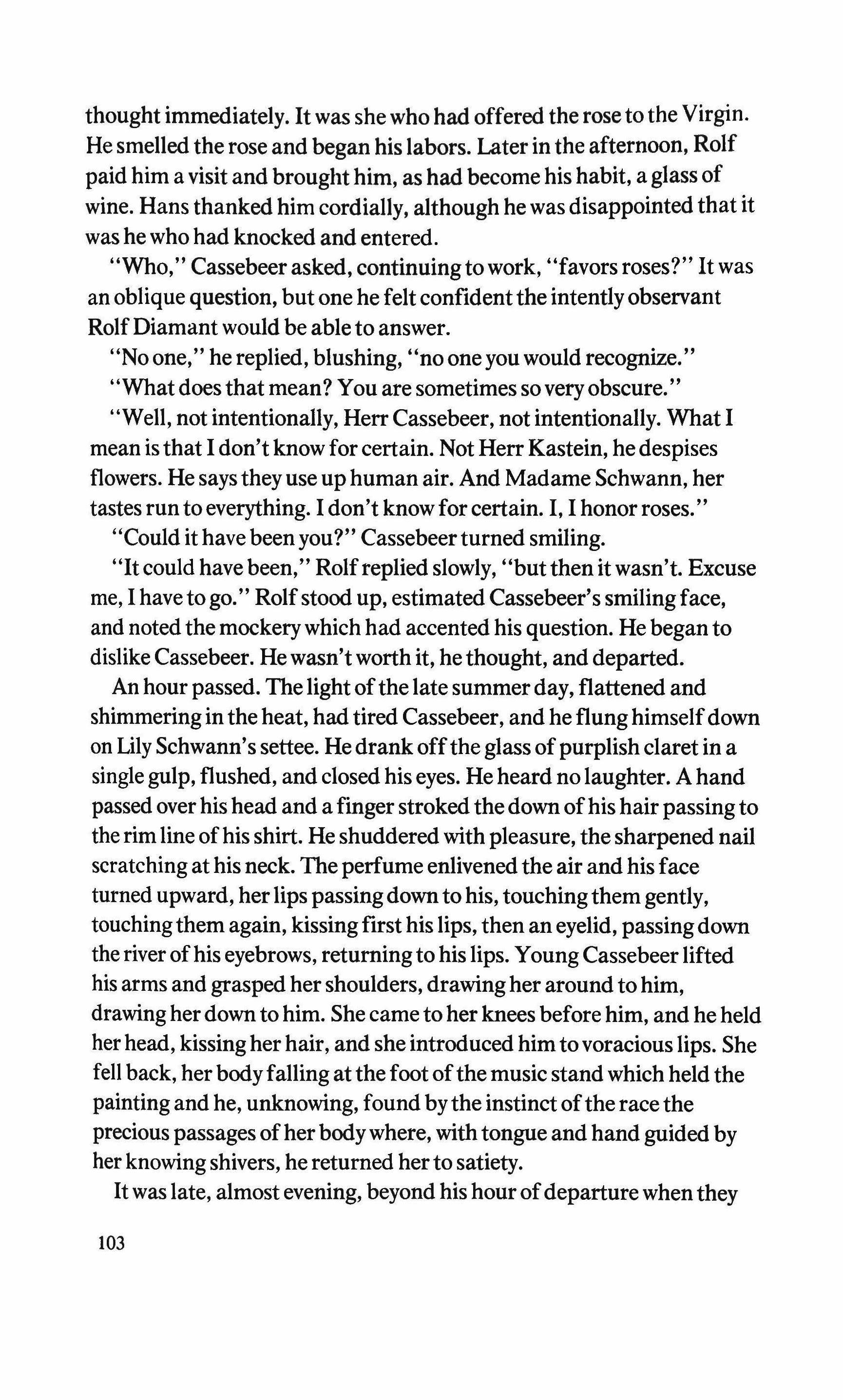
thought immediately. It was she who had offered the rose to the Virgin. He smelled the rose and began his labors. Later in the afternoon, Rolf paid him a visit and broughthim, as had become his habit, a glass of wine. Hans thanked him cordially, although he was disappointed that it was he who had knocked and entered.
"Who," Cassebeer asked, continuing to work, "favors roses?" It was an obliquequestion, but one he felt confidentthe intentlyobservant RolfDiamant would be able to answer.
"No one," he replied, blushing, "no one you would recognize."
"Whatdoes that mean? You are sometimes so veryobscure."
"Well, not intentionally, Herr Cassebeer, not intentionally. What I mean is that I don't know for certain. Not Herr Kastein, hedespises flowers. He saysthey use up human air. And Madame Schwann, her tastes run to everything. I don't knowfor certain. I, I honor roses."
"Could it have beenyou?" Cassebeer turned smiling.
"It could have been," Rolfreplied slowly, "butthen it wasn't. Excuse me, I have to go." Rolfstood up, estimated Cassebeer's smilingface, and noted the mockerywhich had accented his question. He began to dislike Cassebeer. Hewasn't worth it, hethought, and departed.
An hour passed. The light ofthelate summer day, flattened and shimmering in the heat, had tired Cassebeer, and he flunghimselfdown on Lily Schwarm's settee. He drank offthe glass ofpurplish claret in a singlegulp, flushed, and closed his eyes. He heard no laughter. A hand passed over his head and a finger stroked thedown ofhis hair passing to the rim line ofhis shirt. He shuddered with pleasure, the sharpened nail scratching at his neck. The perfume enlivened the air and his face turned upward, herlipspassingdown to his, touchingthem gently, touchingthem again, kissingfirst his lips, then an eyelid, passingdown the riverofhis eyebrows, returning to his lips. Young Cassebeer lifted his arms and grasped hershoulders, drawing her around to him, drawing herdown to him. She came to her knees before him, and he held herhead, kissing her hair, and she introduced himto voracious lips. She fell back, herbodyfalling at the foot ofthe music stand which held the painting and he, unknowing, found bythe instinct ofthe race the precious passages ofherbodywhere, withtongue and hand guidedby her knowingshivers, he returned her to satiety.
It was late, almost evening, beyond his hourofdeparture whenthey
103
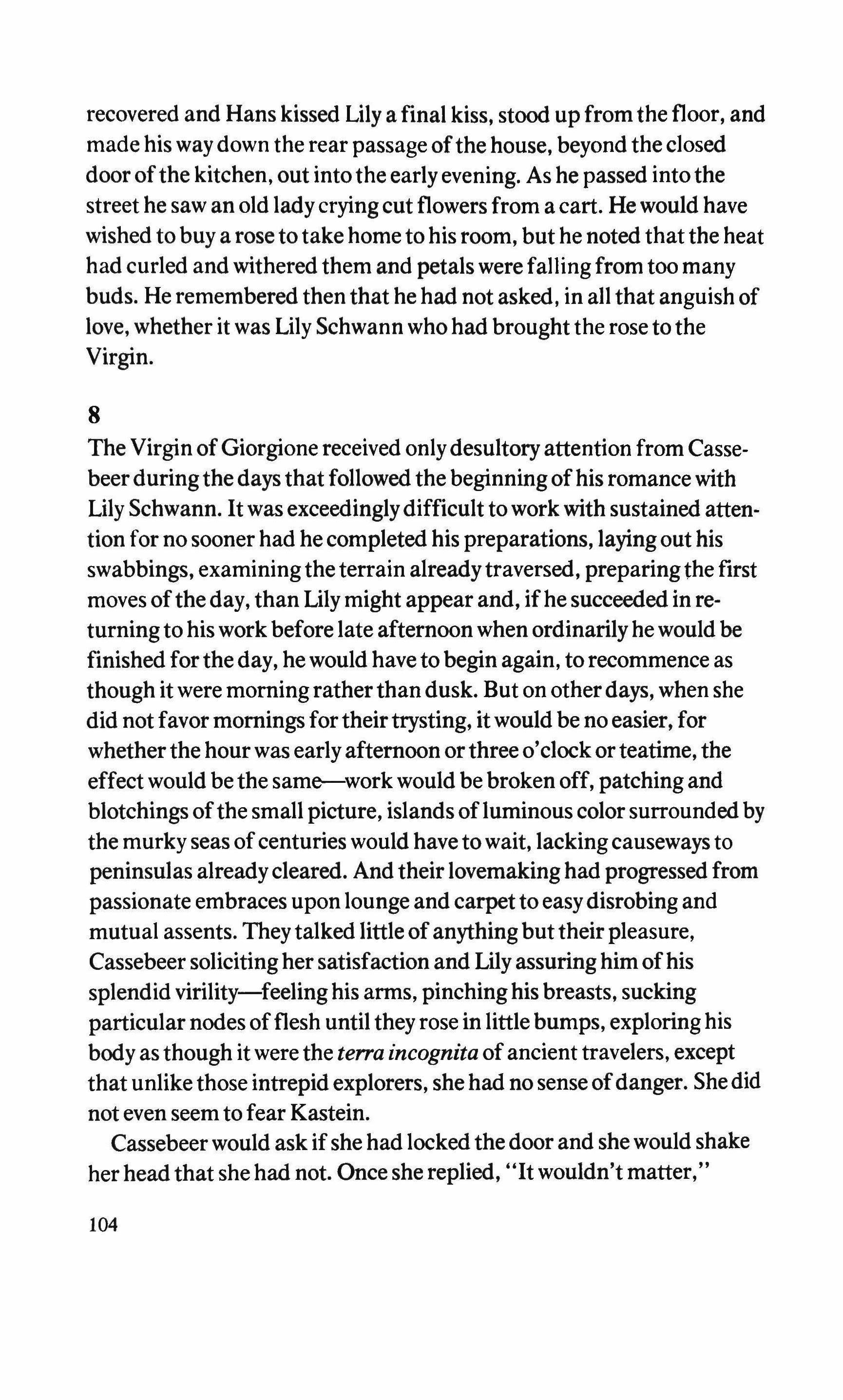
recovered and Hans kissed Lily a final kiss, stood up fromthe floor, and made his way down the rear passage ofthe house, beyond the closed door ofthe kitchen, out intothe earlyevening. As he passed intothe street he saw an old ladycrying cut flowers from a cart. He would have wished to buy a rose to take home to his room, but he noted that the heat had curled and withered them and petals were falling from too many buds. He remembered then that he had not asked, in all that anguish of love, whether it was Lily Schwarm who had brought the rose to the Virgin.
8
The Virgin ofGiorgione received onlydesultoryattention from Cassebeerduringthe days that followed the beginningofhis romance with Lily Schwann. It was exceedinglydifficult to work with sustained attention for no sooner had he completed his preparations, laying out his swabbings, examiningtheterrain alreadytraversed, preparingthe first moves ofthe day, than Lilymight appear and, ifhe succeeded in returning to his work before late afternoon when ordinarily he would be finished forthe day, hewould have to beginagain, to recommence as though it were morning ratherthan dusk. But on other days, when she did not favor mornings fortheirtrysting, itwould be no easier, for whetherthe hour was earlyafternoon or three 0'clock or teatime, the effect would bethe same-work would be broken off, patching and blotchings ofthe small picture, islands ofluminous color surrounded by the murky seas ofcenturies would have to wait, lackingcauseways to peninsulas alreadycleared. And their lovemaking had progressed from passionate embraces upon lounge and carpet to easydisrobing and mutual assents. Theytalked little ofanythingbut their pleasure, Cassebeer soliciting her satisfaction and Lilyassuring himofhis splendidvirility-feeling his arms, pinching his breasts, sucking particular nodes offlesh until they rose in little bumps, exploring his body as though it were the terra incognita ofancient travelers, except that unlike those intrepidexplorers, she had no sense ofdanger. She did not even seem to fear Kastein.
Cassebeer would ask if she had locked the door and shewould shake her head that she had not. Once she replied, "It wouldn't matter,"
104
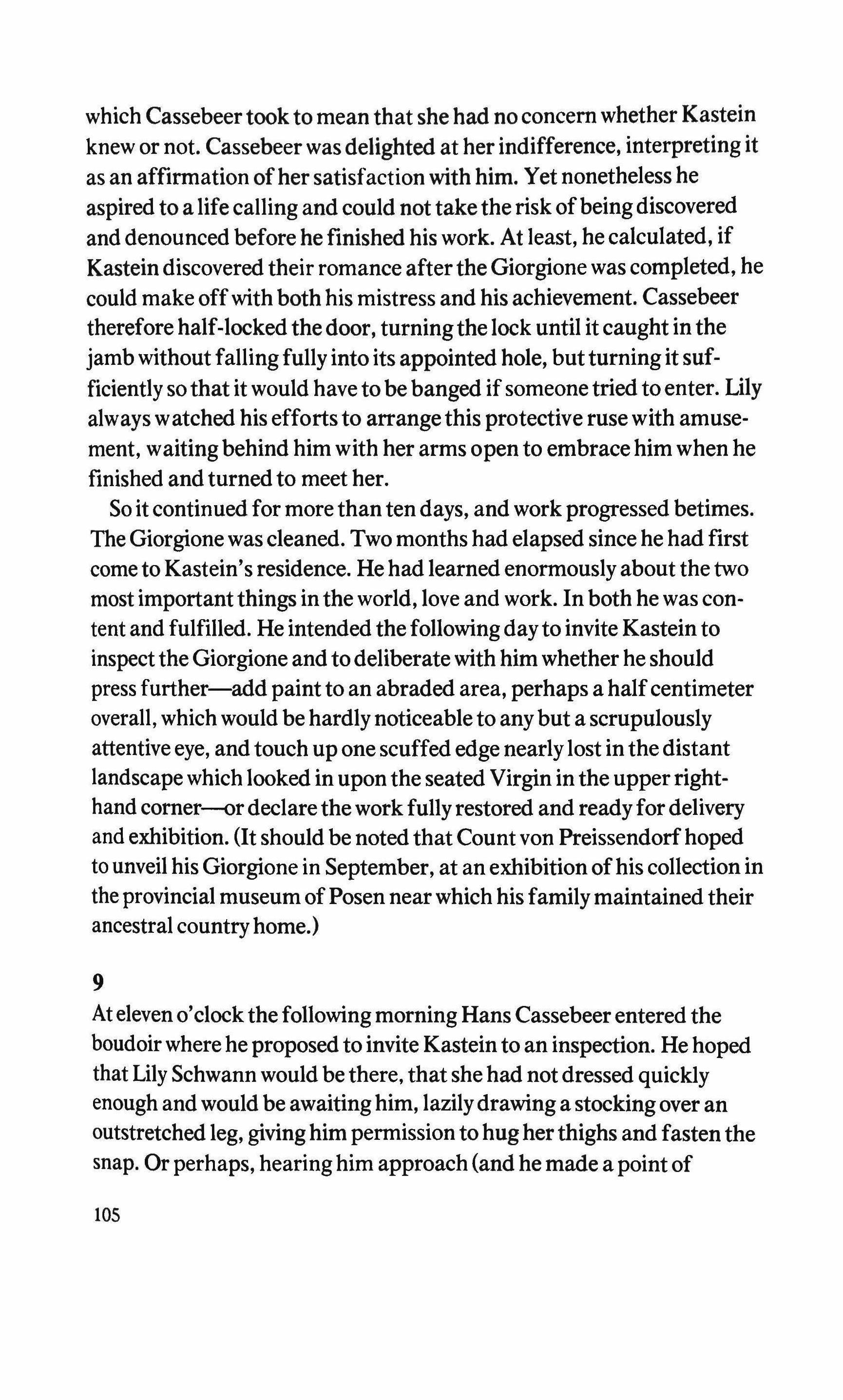
which Cassebeer took to mean that she had no concern whether Kastein knew or not. Cassebeer was delighted at her indifference, interpreting it as an affirmation ofher satisfaction with him. Yet nonetheless he aspired to a life calling and could not takethe risk ofbeingdiscovered and denounced before he finished his work. At least, he calculated, if Kastein discovered their romance afterthe Giorgione was completed, he could make offwith both his mistress and his achievement. Cassebeer therefore half-locked thedoor, turningthe lock until it caught in the jamb without fallingfully into its appointed hole, butturningit sufficiently so that it would have to be banged if someone tried to enter. Lily always watched his efforts to arrangethis protective ruse with amusement, waitingbehind him with her arms open to embrace him when he finished and turned to meet her.
So it continued for more than ten days, and work progressed betimes. The Giorgione was cleaned. Two months had elapsed since he had first come to Kastein's residence. He had learned enormously about the two most importantthings in the world, love and work. In both he was content and fulfilled. He intended thefollowingdayto invite Kastein to inspectthe Giorgione and to deliberate with him whether he should press further-add paint to an abraded area, perhaps a halfcentimeter overall, which would be hardlynoticeable to anybut a scrupulously attentive eye, and touch up one scuffed edgenearly lost in the distant landscape which looked in upon the seated Virgin in the upperrighthand corner-or declare thework fullyrestored and ready fordelivery and exhibition. (It should be noted that Count von Preissendorf hoped to unveil his Giorgione in September, at an exhibition ofhis collection in theprovincial museum of Posen near which his familymaintained their ancestral countryhome.)
9
At eleven 0'clockthe followingmorning Hans Cassebeerentered the boudoirwhere he proposed to invite Kastein to an inspection. He hoped that Lily Schwann would be there, that she had not dressed quickly enough and would be awaitinghim, lazilydrawing a stocking over an outstretched leg, giving him permission to hugherthighs and fasten the snap. Or perhaps, hearing him approach(and he made a point of lOS
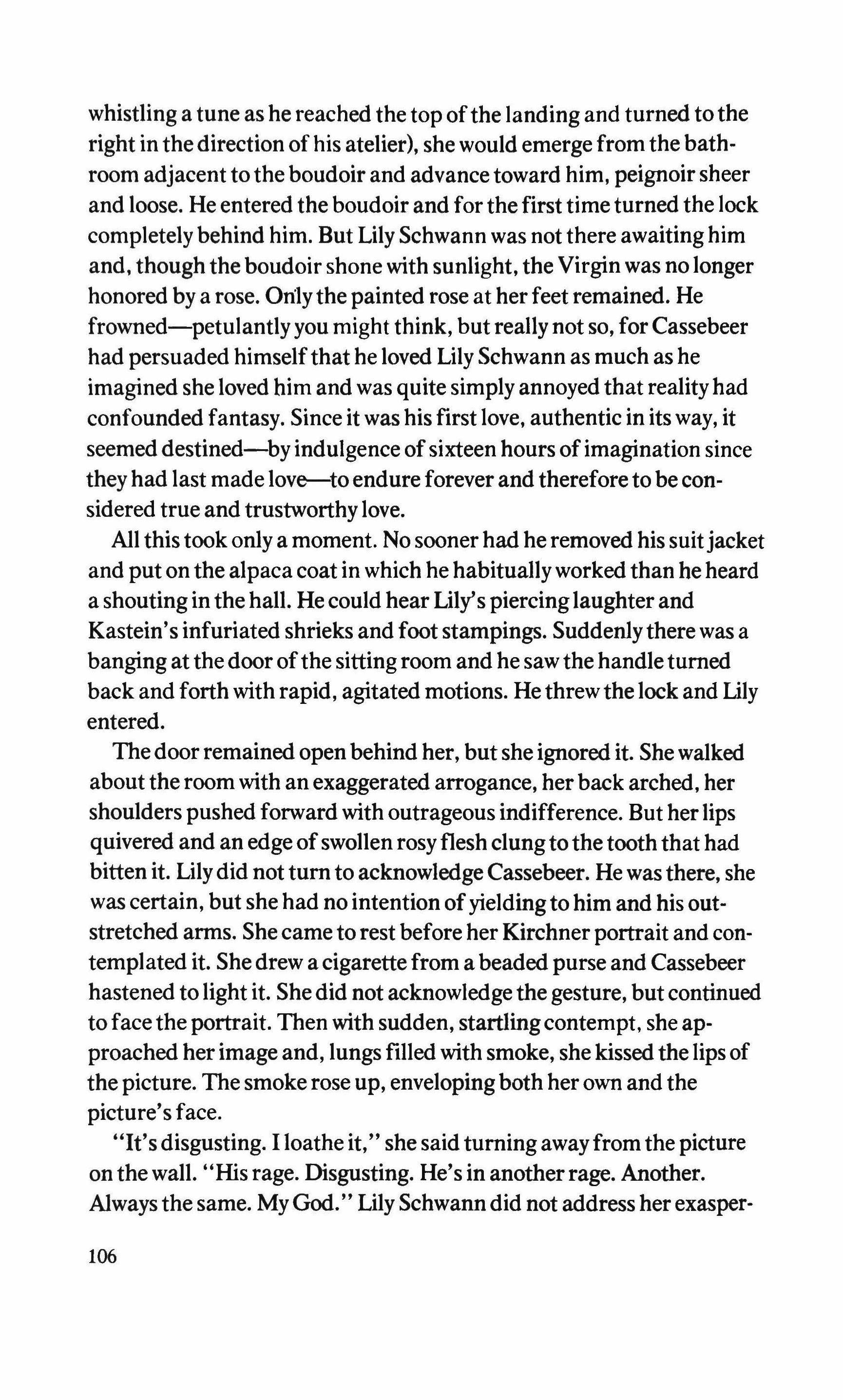
whistling a tune as he reached the top ofthe landing and turned to the right in thedirection of his atelier), she would emerge from the bathroom adjacent to the boudoir and advance toward him, peignoir sheer and loose. He entered the boudoir and for the first time turned the lock completely behind him. But Lily Schwarm was not there awaiting him and, though the boudoir shone with sunlight, the Virgin was no longer honored by a rose. Onlythe painted rose at her feet remained. He frowned-petulantly you might think, but really not so, for Cassebeer had persuaded himselfthat he loved Lily Schwann as much as he imagined she loved him and was quite simplyannoyed that realityhad confounded fantasy. Since it was his first love, authentic in its way, it seemed destined-byindulgence ofsixteen hours ofimagination since they had last made love--toendure forever and therefore to be considered true and trustworthy love.
All this took only a moment. No sooner had he removed his suitjacket and put on the alpaca coat in which he habituallyworked than he heard a shouting in the hall. He could hear Lily'spiercinglaughter and Kastein's infuriated shrieks and foot stampings. Suddenlythere was a banging at thedoor ofthe sitting room and he saw the handleturned back and forth with rapid, agitated motions. He threwthe lock and Lily entered.
The door remained open behind her, but she ignored it. She walked about the room with an exaggerated arrogance, herback arched, her shoulders pushed forward with outrageous indifference. But herlips quivered and an edge ofswollen rosyflesh clungto the tooth that had bitten it. Lilydid not turn to acknowledge Cassebeer. He was there, she was certain, but she had no intention ofyielding to him and his outstretched arms. She came to rest before her Kirchner portrait and contemplated it. She drew a cigarette from a beaded purse and Cassebeer hastened to light it. She did not acknowledge the gesture, but continued to facethe portrait. Then with sudden, startlingcontempt, she approached her imageand, lungs filled with smoke, she kissed the lips of the picture. The smoke rose up, envelopingboth her own and the picture's face.
"It's disgusting. I loathe it," she said turning awayfrom the picture on the wall. "His rage. Disgusting. He's in another rage. Another. Always the same. MyGod." Lily Schwann did not address her exasper-
106
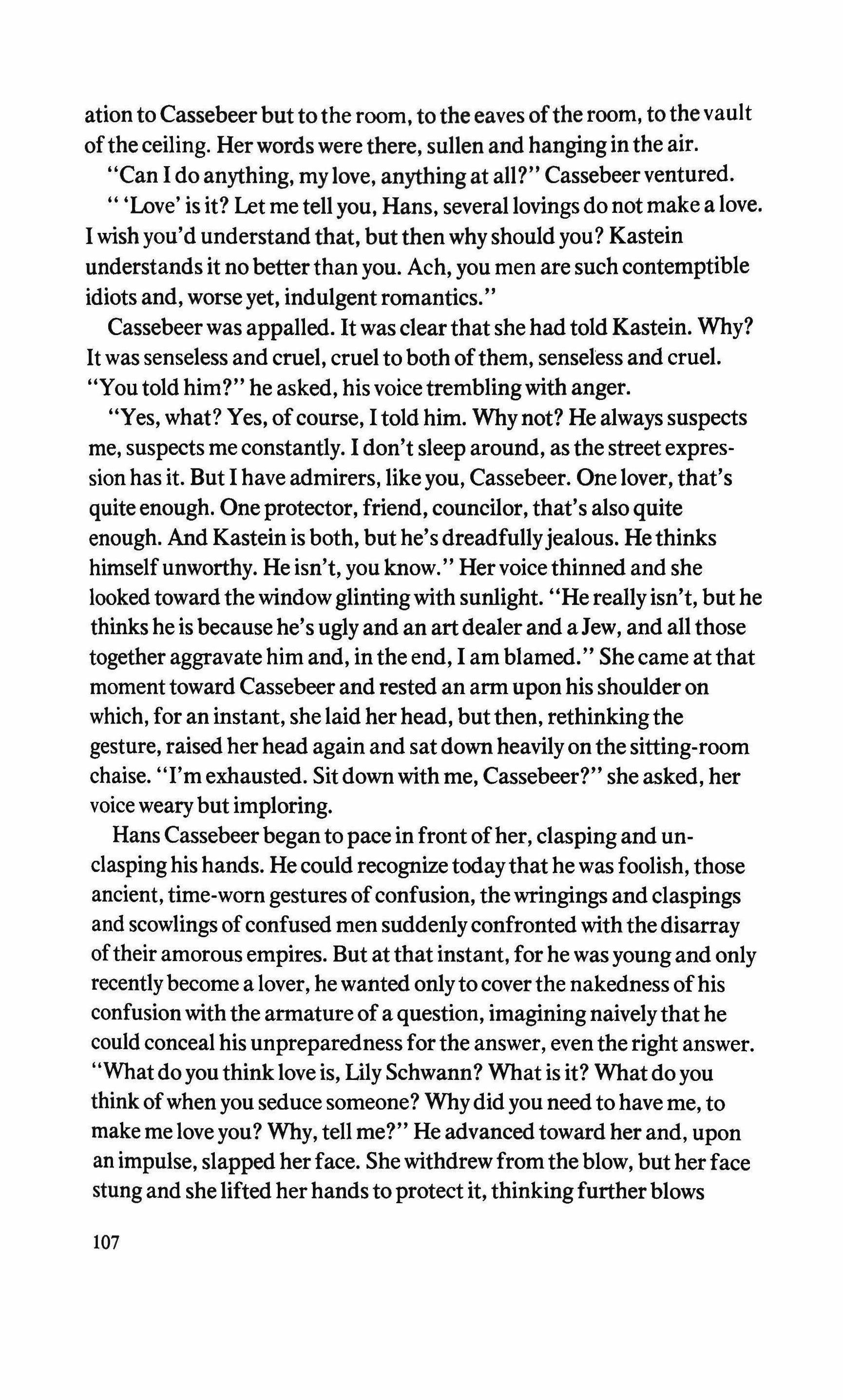
ation to Cassebeer but to the room, to the eaves ofthe room, to thevault ofthe ceiling. Herwords were there, sullen and hanginginthe air.
"Can I do anything, my love, anything at all?" Cassebeer ventured. 'Love' is it? Let me tell you, Hans, severallovings do not make a love. I wish you'd understand that, but then why should you? Kastein understands it no betterthan you. Ach, you men are such contemptible idiots and, worse yet, indulgent romantics."
Cassebeer was appalled. It was clearthat she had told Kastein. Why? It was senseless and cruel, cruel to both ofthem, senseless and cruel. "You told him?" he asked, his voicetremblingwith anger.
"Yes, what? Yes, of course, I told him. Whynot? He always suspects me, suspects me constantly. I don't sleep around, as the street expression has it. But I have admirers, like you, Cassebeer. One lover, that's quiteenough. Oneprotector, friend, councilor, that's also quite enough. And Kastein is both, but he's dreadfullyjealous. Hethinks himselfunworthy. He isn't, you know." Hervoice thinned and she looked towardthe windowglintingwith sunlight. "He reallyisn't, but he thinks he is because he's ugly and an art dealer and a Jew, and all those together aggravate him and, in the end, I am blamed." She came at that moment toward Cassebeer and rested an arm upon his shoulder on which, for an instant, she laid her head, butthen, rethinkingthe gesture, raised her head again and sat down heavily on the sitting-room chaise. "I'm exhausted. Sit downwith me, Cassebeer?" she asked, her voice weary but imploring.
Hans Cassebeer began to pace in front ofher, clasping and unclaspinghis hands. He could recognizetodaythat he was foolish, those ancient, time-worn gestures ofconfusion, thewringings and c1aspings and scowlings ofconfused men suddenlyconfronted with thedisarray oftheir amorous empires. But at that instant, for he was youngand only recentlybecome a lover, he wanted onlyto cover the nakedness ofhis confusion withthe armature of a question, imaginingnaivelythat he could conceal his unpreparedness forthe answer, even the right answer. "Whatdoyou think love is, Lily Schwann? What is it? Whatdoyou think ofwhenyou seduce someone? Whydid you need to have me, to make me love you? Why, tell me?" He advanced toward her and, upon an impulse, slapped herface. She withdrewfrom the blow, but herface stung and she lifted her hands to protectit, thinkingfurtherblows
107
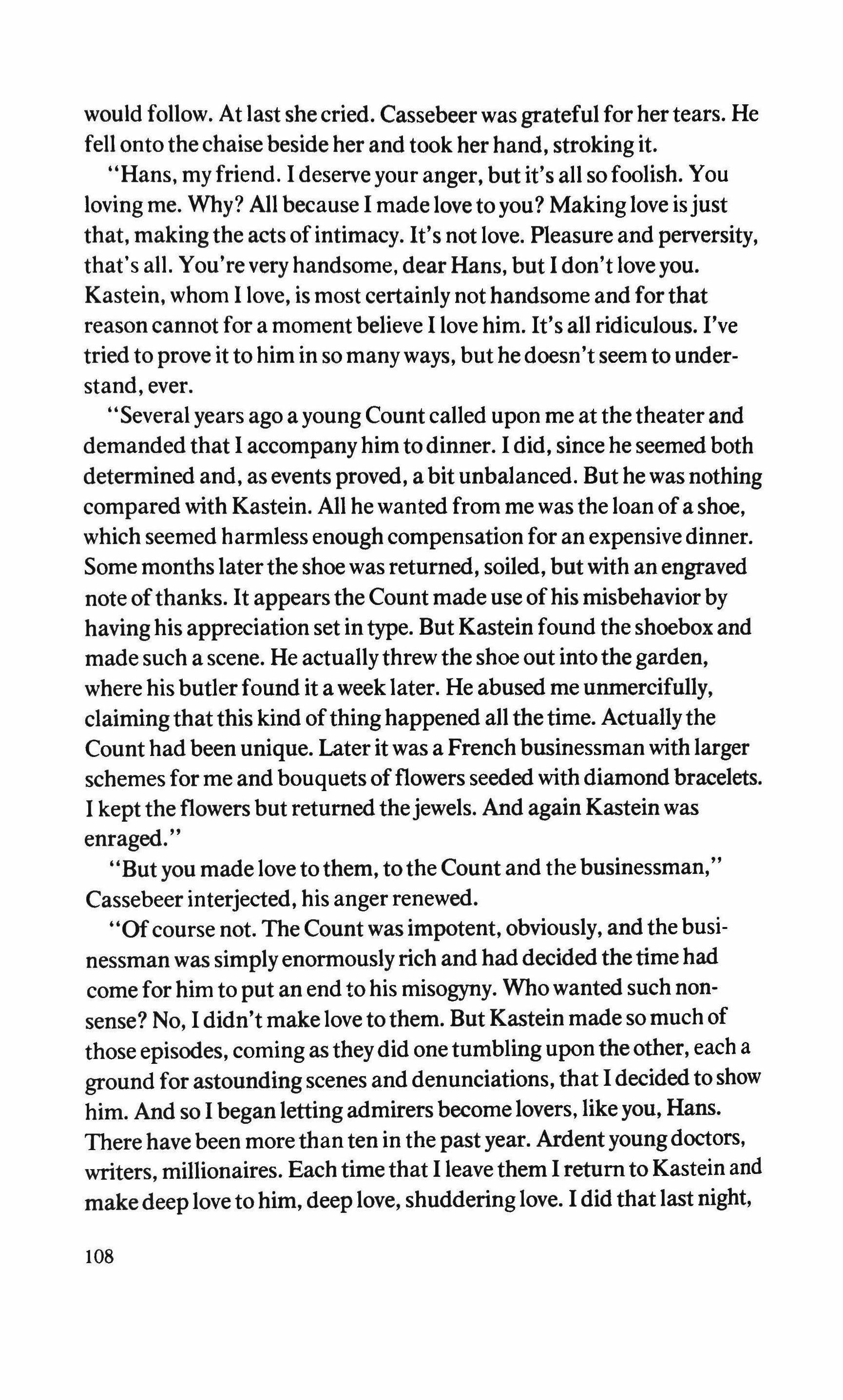
would follow. At last she cried. Cassebeer was grateful for her tears. He fell onto the chaise beside her and took her hand, stroking it.
"Hans, my friend. I deserve your anger, but it's all so foolish. You loving me. Why? All because I made love to you? Making love isjust that, making the acts of intimacy. It's not love. Pleasure and perversity, that's all. You're very handsome, dear Hans, but I don't loveyou. Kastein, whom I love, is most certainly not handsome and forthat reason cannot for a moment believe I love him. It's all ridiculous. I've tried to prove it to him in so many ways, but he doesn't seem to understand, ever.
"Several years ago a young Count called upon me at the theater and demanded that I accompany him to dinner. I did, since he seemed both determined and, as events proved, a bit unbalanced. But he was nothing compared with Kastein. All he wanted from me was the loan of a shoe, which seemed harmless enoughcompensation for an expensive dinner. Some months laterthe shoe was returned, soiled, but with an engraved note ofthanks. It appears the Count made use ofhis misbehavior by having his appreciation set intype. But Kastein found the shoebox and made such a scene. He actually threw the shoe out intothe garden, where his butler found it a week later. He abused me unmercifully, claimingthatthis kind ofthinghappened all thetime. Actuallythe Count had been unique. Later it was a French businessman with larger schemes for me and bouquets offlowers seeded with diamond bracelets. I kept the flowers but returned thejewels. And again Kastein was enraged."
"But you made love to them, to the Count and the businessman," Cassebeer interjected, his anger renewed.
"Of course not. The Count was impotent, obviously, and the businessman was simplyenormously rich and had decided thetime had come for him to put an end to his misogyny. Who wanted such nonsense? No, I didn't make love to them. But Kastein made so much of those episodes, coming as theydid one tumbling upon theother, each a ground for astounding scenes and denunciations, that I decided to show him. And so I beganletting admirers become lovers, like you, Hans. There have been more than ten in the past year. Ardent youngdoctors, writers, millionaires. Each time that I leave them I return to Kastein and makedeep love to him, deep love, shuddering love. I did that last night,
108
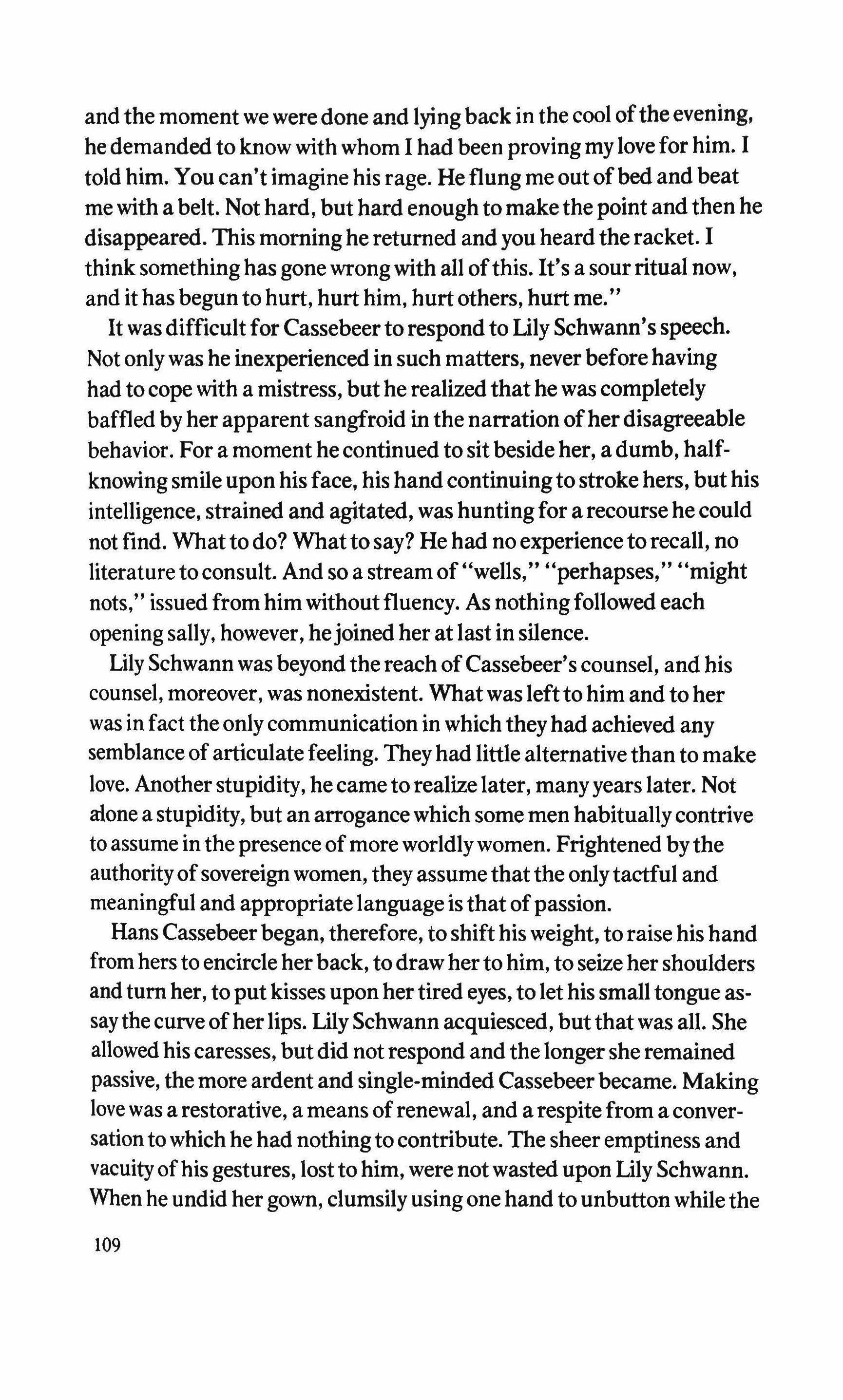
and the moment we were done and lyingback in the cool oftheevening, he demanded to knowwith whom I had been proving my love for him. I told him. You can't imagine his rage. He flung me out ofbed and beat me with a belt. Not hard, but hard enough to make the point and then he disappeared. This morning he returned and you heard the racket. I think somethinghas gone wrong with all ofthis. It's a sour ritual now, and it has begun to hurt, hurt him, hurt others, hurt me."
It was difficult for Cassebeer to respond to Lily Schwann's speech. Not only was he inexperienced in such matters, never before having had to cope with a mistress, but he realized that he was completely baffled by her apparent sangfroid in the narration ofherdisagreeable behavior. For a moment hecontinued to sitbeside her, a dumb, halfknowing smile upon his face, his hand continuingto stroke hers, but his intelligence, strained and agitated, was huntingfor a recourse he could not find. What to do? What to say? He had no experience to recall, no literature to consult. And so a stream of "wells," "perhapses," "might nots," issued from him without fluency. As nothingfollowed each openingsally, however, hejoined her at last in silence.
Lily Schwann was beyond the reach ofCassebeer' s counsel, and his counsel, moreover, was nonexistent. What was leftto him and to her was in fact the only communication in which theyhad achieved any semblance ofarticulate feeling. They had little alternative than to make love. Another stupidity, he came to realize later, manyyears later. Not alone a stupidity, but an arrogance which some men habituallycontrive to assume in the presence of more worldly women. Frightened bythe authorityofsovereign women, they assume thatthe onlytactful and meaningful and appropriatelanguage isthat ofpassion.
Hans Cassebeer began, therefore, to shift his weight, to raise his hand from hers to encircle herback, to drawher to him, to seize her shoulders and turn her, to put kisses upon hertired eyes, to let his small tongue assaythe curve ofherlips. Lily Schwann acquiesced, butthat was all. She allowed his caresses, but did not respond and the longer she remained passive, the more ardent and single-minded Cassebeerbecame. Making love was a restorative, a means ofrenewal, and a respitefrom a conversation to which he had nothingto contribute. The sheer emptiness and vacuity ofhis gestures, lost to him, were not wasted upon Lily Schwann. When he undid her gown, clumsilyusing one hand to unbutton whilethe
109
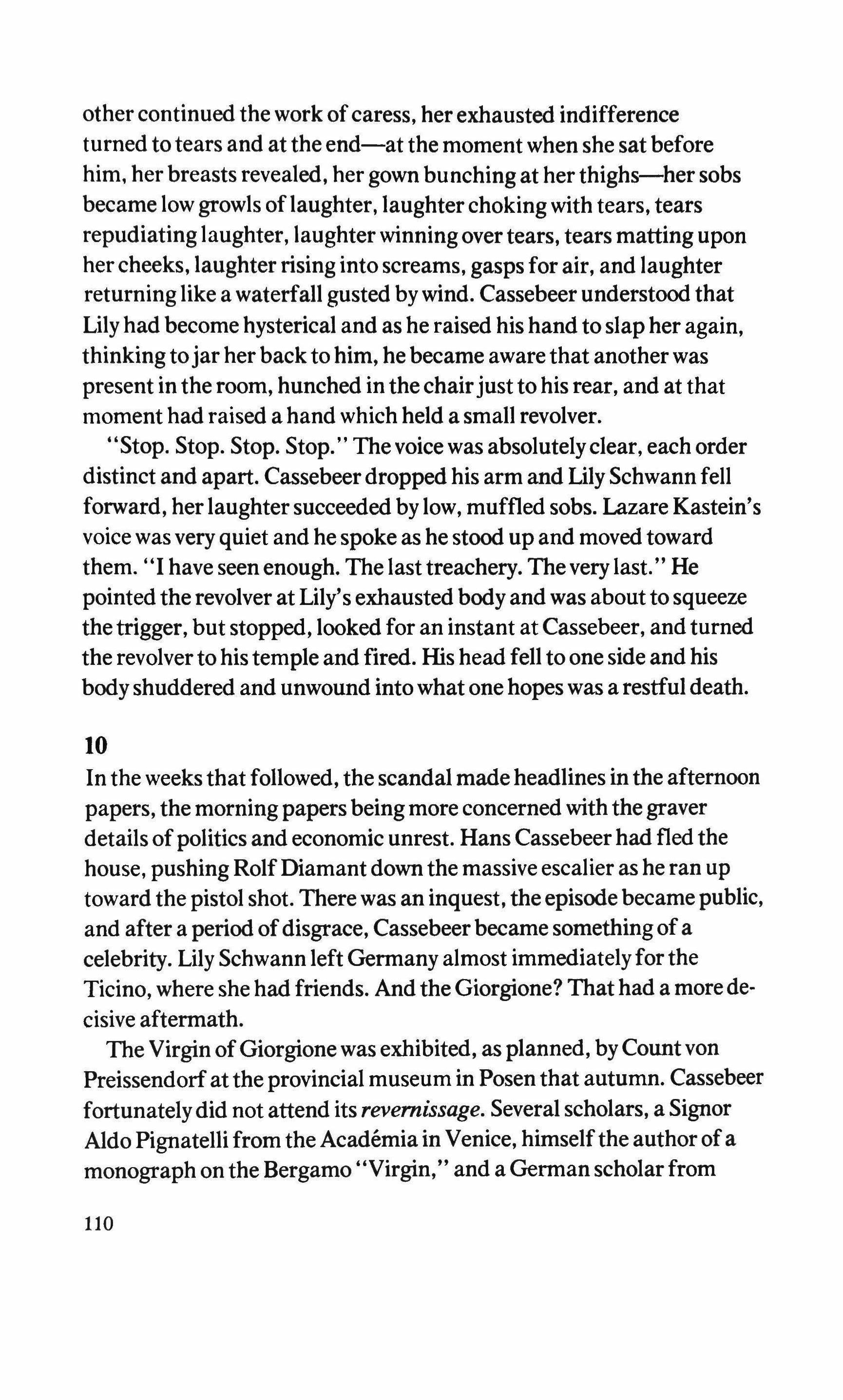
other continued the work of caress, her exhausted indifference turned to tears and at the end-at the moment when she sat before him, her breasts revealed, her gown bunching at her thighs-her sobs became low growls oflaughter, laughterchoking with tears, tears repudiatinglaughter, laughterwinning over tears, tears matting upon hercheeks, laughterrising into screams, gasps for air, and laughter returning like a waterfall gusted bywind. Cassebeer understood that Lily had become hysterical and as he raised his hand to slap her again, thinking tojar her back to him, he became aware that another was present in the room, hunched in the chairjust to his rear, and at that moment had raised a hand which held a small revolver.
"Stop. Stop. Stop. Stop." The voice was absolutelyclear, each order distinct and apart. Cassebeer dropped his arm and Lily Schwann fell forward, her laughter succeeded bylow, muffled sobs. Lazare Kastein's voice was very quiet and he spoke as he stood up and moved toward them. "I have seen enough. The last treachery. The very last." He pointed the revolver at Lily's exhausted body and was about to squeeze thetrigger, but stopped, looked for an instant at Cassebeer, and turned the revolver to his temple and fired. His head fell to one side and his body shuddered and unwound intowhat one hopes was a restful death.
10
In the weeks that followed, the scandal made headlines in the afternoon papers, the morning papers being more concerned with the graver details ofpolitics and economic unrest. Hans Cassebeer had fled the house, pushing RolfDiamant down the massive escalier as he ran up toward the pistol shot. There was an inquest, the episode became public, and after a period ofdisgrace, Cassebeer became somethingof a celebrity. Lily Schwann left Germanyalmost immediatelyforthe Ticino, where she had friends. And the Giorgione? That had a more decisive aftermath.
The Virgin ofGiorgione was exhibited, as planned, byCount von Preissendorf at the provincial museum in Posen that autumn. Cassebeer fortunatelydid not attend its revemissage. Several scholars, a Signor AIdo Pignatelli from the Academia in Venice, himselfthe author of a monograph on the Bergamo"Virgin," and a German scholar from 110
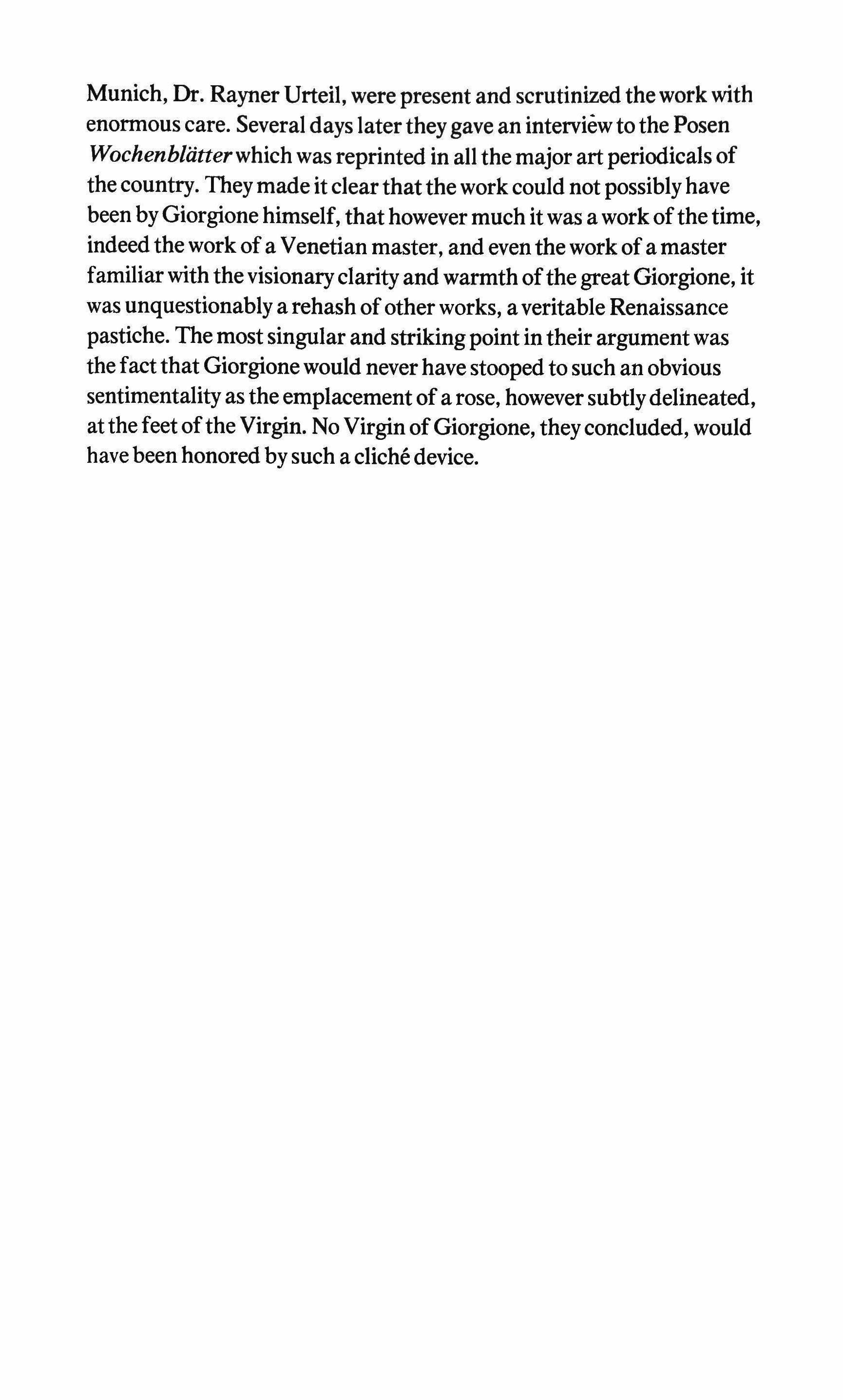
Munich, Dr. RaynerUrteil, were present and scrutinized thework with enormous care. Several days laterthey gave an interview to the Posen Wochenblatterwhich was reprinted in all the major art periodicals of the country. They made it clear thatthe work could not possibly have been byGiorgione himself, that however much it was a work ofthe time, indeed the work of a Venetian master, and even the work of a master familiar with thevisionaryclarity and warmth ofthe greatGiorgione, it was unquestionably a rehash ofother works, a veritable Renaissance pastiche. The most singular and strikingpoint intheir argument was the fact that Giorgionewould never have stooped to such an obvious sentimentality as the emplacement of a rose, however subtlydelineated, atthe feet ofthe Virgin. No Virgin ofGiorgione, theyconcluded, would have been honored by such a cliche device.
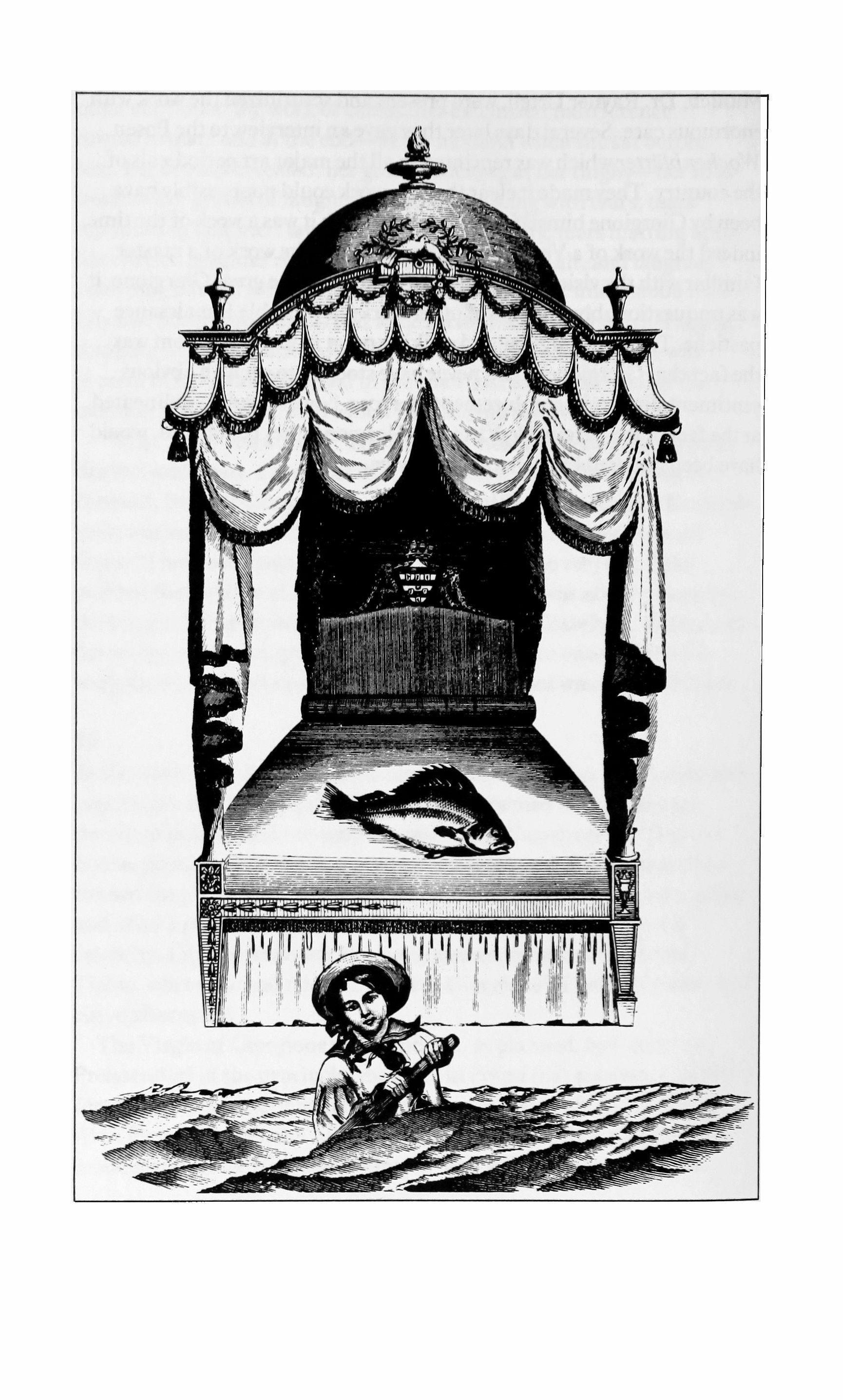
Cordials
David Kranes
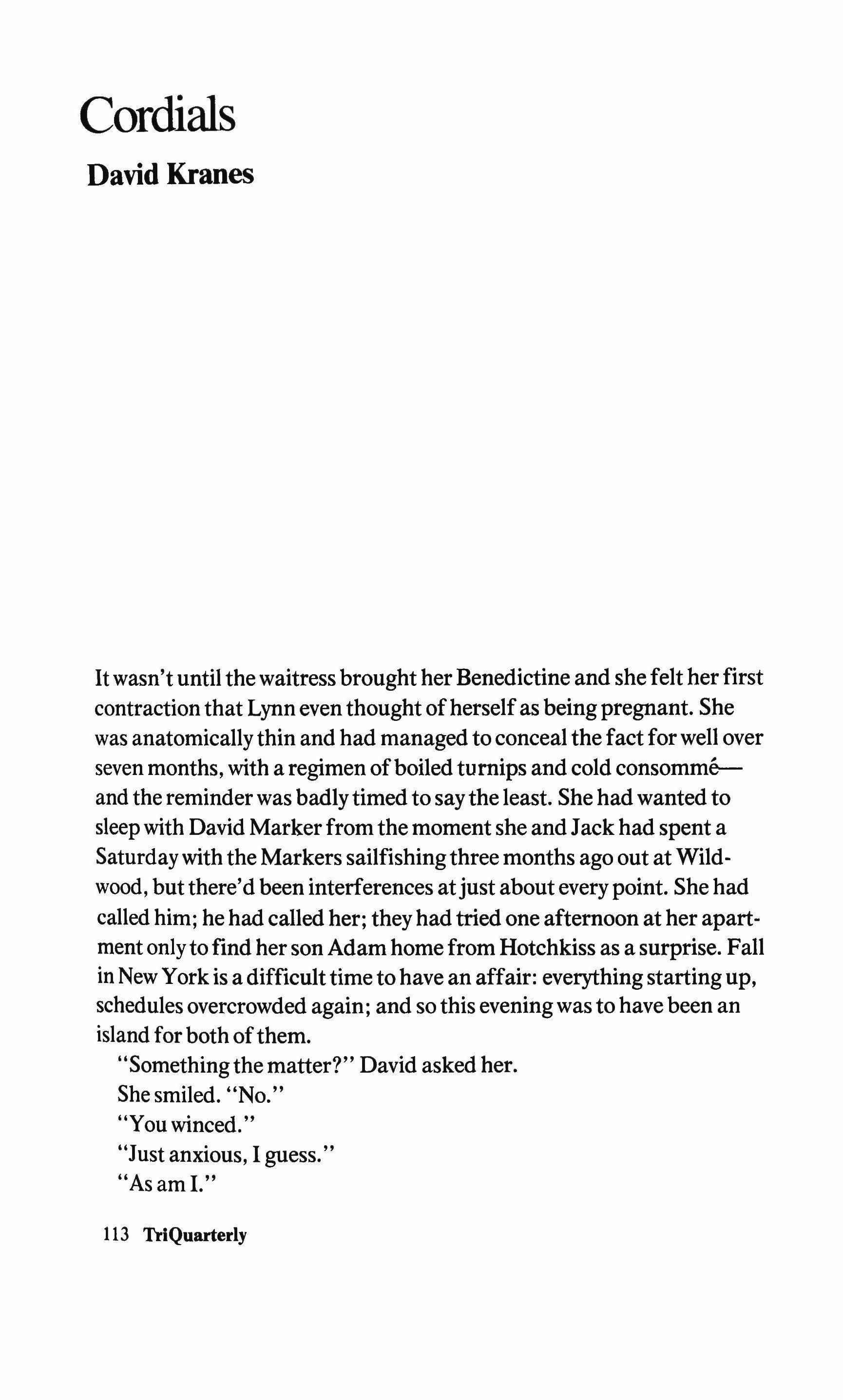
It wasn't until thewaitress brought her Benedictine and she felt herfirst contraction that Lynn even thought ofherself as beingpregnant. She was anatomicallythin and had managed to conceal the fact forwell over seven months, with a regimen ofboiled turnips and cold consommeand the reminder was badlytimed to saythe least. She had wanted to sleepwith David Marker from the moment she and Jack had spent a Saturdaywith the Markers sailfishingthree months ago out at Wildwood, but there'd been interferences atjust about every point. She had called him; he had called her; they had tried one afternoon at her apartment onlyto find her son Adam home from Hotchkiss as a surprise. Fall in New York is a difficulttime to have an affair: everythingstarting up, schedules overcrowded again; and so this evening was to have been an island forboth ofthem.
"Somethingthe matter?" David asked her. She smiled. "No."
"You winced."
"Just anxious, I guess."
"As am I." 113 TriQuarterly

She rubbed the knuckles ofhis hand, climbingeach ridge, kneading the loose skin in the depressions with her forefinger and thumb.
"Doyou want to leave now?" he asked
Let's finish our drinks," she said, her eyes partly on her watch, wonderingwhen the next contraction would come. It came seven minutes later. She drained her glass: "All through," she said.
David smiled, breathed in his Drambuie and drained it. "Let's go," he said.
He helped her on with her coat. "Where are we ?"
"A friend lent me his studio."
"Where?"
"Rowayton."
"That's an hour."
"Fifty minutes. And it's a nice Indian summer. We'll drive with the windows down. Sea smell's an aphrodisiac."
"I don't need an aphrodisiac." Her voice was surprisinglysoft and quiet.
David nodded to the maitre de, and pushed the door open; she went out. "It's a great place-this place-this studio."
Lynn breathed the late September West 52nd Street smells, and felt another contraction coming on.
When they cloverleafed onto the Merritt Parkway, thetugs were comingregularly,just under five minutes. Both the front windows were down. David had the heater on, her coat off. She had herface against his neck, herjawpressed there. She'd worn no bra-she didn't really need to-and he was moving the tips ofhis right middle fingers over the nipple, under her burgundy knit.
You're perspiring," he said, trying to make it sound playful.
"Yes." She bit at him. "It's the heater. The blower's goingright up my dress." She knew, in fact, it was probablylactating.
"Rowayton?" There was a hum in hervoice.
"There are fourteen-foot ceilings," David traced her neck. "And a fireplace.
"Had you planned on usingthe fireplace?"
"For a fire, sure; not for us."
114
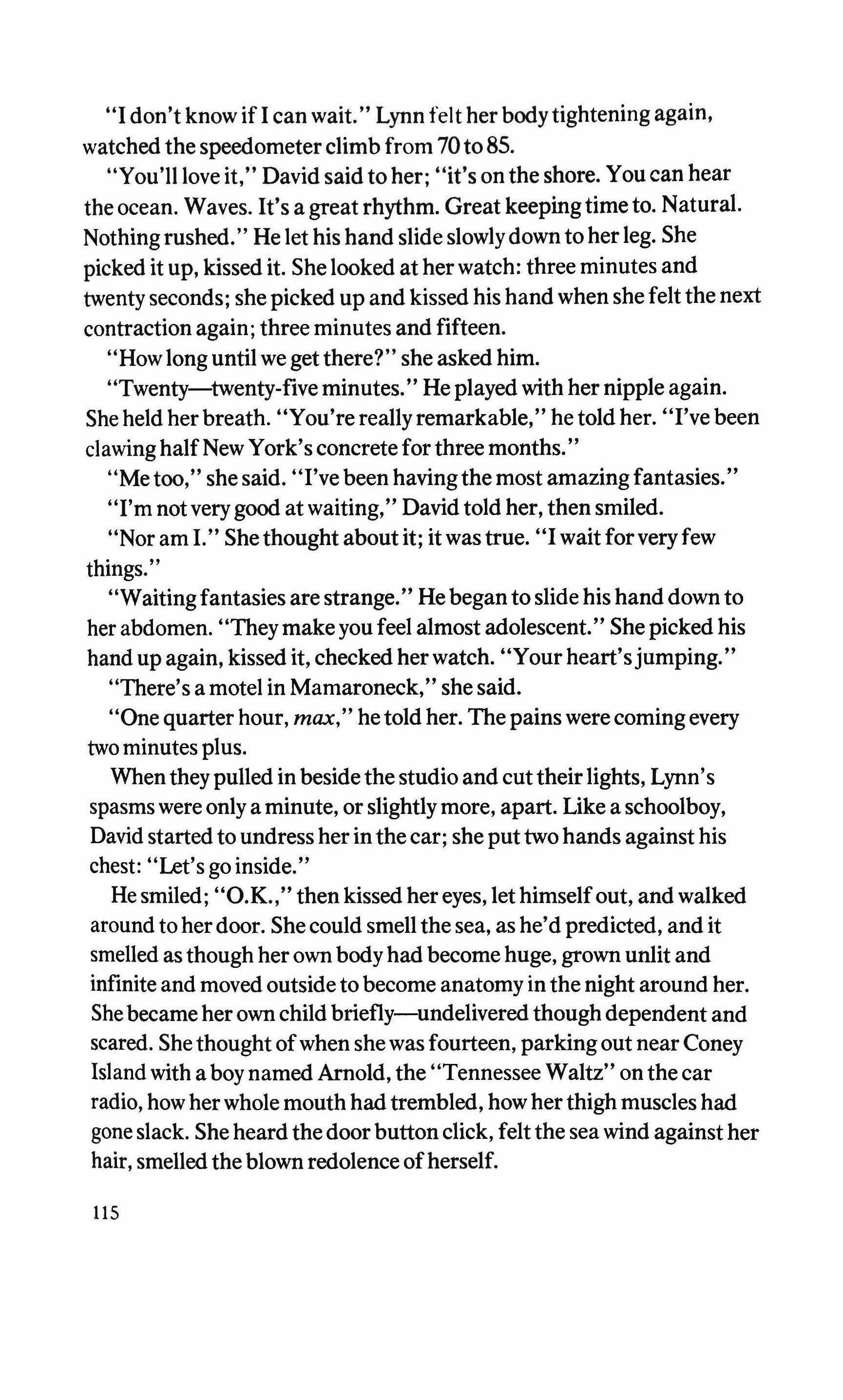
"I don't know if I can wait." Lynn felt her bodytighteningagain, watched the speedometer climb from 70 to 85.
"You'll love it," David said to her; "it's on the shore. You can hear the ocean. Waves. It's a great rhythm. Great keepingtime to. Natural. Nothingrushed." He let his hand slide slowlydown to her leg. She picked it up, kissed it. She looked at herwatch: three minutes and twenty seconds; she picked up and kissed his hand when she felt the next contraction again; three minutes and fifteen.
"Howlong until we get there?" she asked him.
"Twenty-twenty-five minutes." He played with her nippleagain. She held herbreath. "You're reallyremarkable," he told her. "I've been clawinghalfNew York's concrete forthree months."
"Me too," she said. "I've been havingthe most amazingfantasies."
"I'm not verygood at waiting," David told her, then smiled.
"Nor am I." She thought about it; it was true. "I waitforvery few things."
"Waitingfantasies are strange." He began to slide his hand down to her abdomen. "Theymake you feel almost adolescent." She picked his hand up again, kissed it, checked herwatch. "Your heart'sjumping."
"There's a motel in Mamaroneck," she said.
"One quarter hour, max," hetold her. The pains were coming every two minutes plus.
When theypulled in besidethe studio and cut theirlights, Lynn's spasms were only a minute, or slightly more, apart. Like a schoolboy, David started to undress her in the car; she put two hands against his chest: "Let's go inside.
He smiled; "O.K.," then kissed her eyes, lethimselfout, and walked around to herdoor. She could smellthe sea, as he'd predicted, and it smelled as though her own bodyhad become huge, grown unlit and infinite and moved outside to become anatomy in the night around her. Shebecame her own child briefly-undeliveredthoughdependent and scared. She thought ofwhen she was fourteen, parking out near Coney Island with a boy named Arnold, the "Tennessee Waltz" on the car radio, howherwhole mouth had trembled, howherthigh muscles had gone slack. She heard the doorbutton click, felt the sea wind against her hair, smelled the blown redolence ofherself.
115
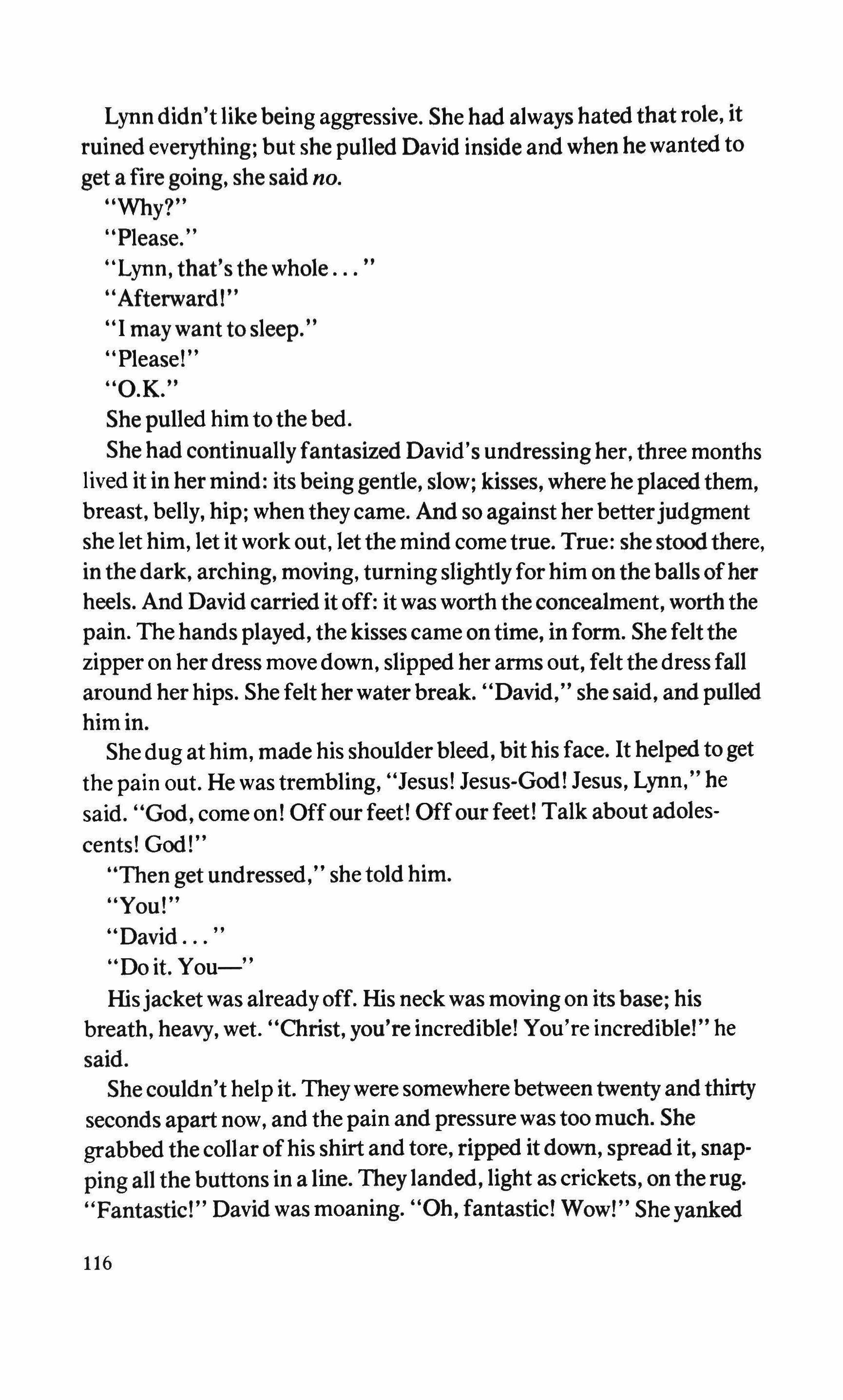
Lynn didn't like being aggressive. She had always hated that role, it ruined everything; but she pulled David inside and when he wanted to get a fire going, she said no.
"Why?"
"Please.
"Lynn, that's the whole " "Afterwardl"
"I maywant to sleep." "Please!" "O.K."
She pulled him to the bed.
She had continually fantasized David's undressingher, three months lived it in her mind: its beinggentle, slow; kisses, where he placedthem, breast, belly, hip; when they came. And so against her betterjudgment she let him, let it work out, letthe mind come true. True: she stoodthere, in the dark, arching, moving, turningslightly forhim on the balls ofher heels. And David carried it off: it was worth the concealment, worth the pain. The hands played, the kisses came on time, in form. She feltthe zipper on herdress move down, slipped her arms out, felt the dress fall around her hips. She felt her water break. "David," she said, and pulled him in.
She dug at him, made his shoulder bleed, bit his face. It helped to get the pain out. He was trembling, "Jesus! Jesus-God! Jesus, Lynn," he said. "God, come on! Off our feet! Off our feet! Talk about adolescents! God!"
"Then get undressed," she told him. "You!"
"David
"Do it. You-"
Hisjacket was alreadyoff. His neck was moving on its base; his breath, heavy, wet. "Christ, you're incredible! You're incredible!" he said.
She couldn't help it. They were somewhere between twenty and thirty seconds apart now, and the pain and pressure was too much. She grabbed the collar ofhis shirt and tore, ripped it down, spread it, snapping all the buttons in a line. Theylanded, light as crickets, on the rug. "Fantastic!" David was moaning. "Oh, fantastic! Wow!" Sheyanked
116
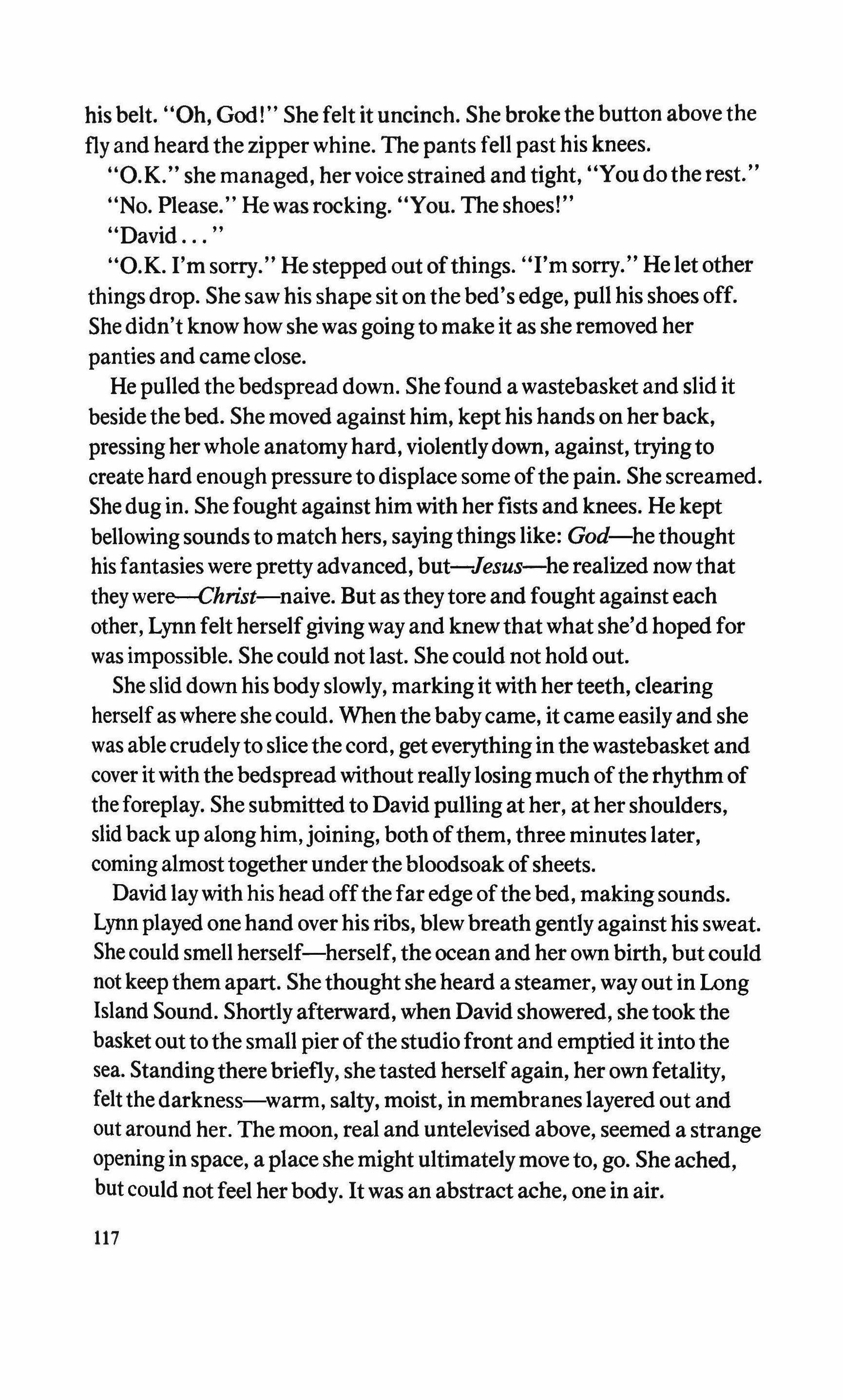
his belt. "Oh, God!" She felt it uncinch. She broke the button above the fly and heard the zipper whine. The pants fell past his knees.
"O.K." she managed, hervoice strained and tight, "You do the rest." "No. Please." He was rocking. "You. The shoes!"
"David
"O.K. I'm sorry." He stepped out ofthings. "I'm sorry." He let other thingsdrop. She saw his shape sit on the bed's edge, pull his shoes off. She didn't know howshe was going to make it as she removed her panties and came close.
He pulled the bedspread down. She found a wastebasket and slid it beside the bed. She moved against him, kept his hands on herback, pressing herwhole anatomyhard, violentlydown, against, tryingto create hard enough pressure to displace some ofthe pain. She screamed. She dug in. She foughtagainst himwith her fists and knees. He kept bellowingsounds to match hers, sayingthings like: God-he thought his fantasies were prettyadvanced, but-jesus-he realized now that theywere-Christ-naive. But as theytore and foughtagainst each other, Lynn felt herselfgiving way and knewthat what she'd hoped for was impossible. She could not last. She could not hold out.
She slid down hisbodyslowly, markingit with herteeth, clearing herself as where she could. When thebaby came, it came easilyand she was ablecrudelyto slicethe cord, geteverything inthe wastebasket and cover itwith thebedspread without reallylosingmuch ofthe rhythmof theforeplay. She submitted to David pulling at her, at her shoulders, slid back up alonghim,joining, both ofthem, three minutes later, comingalmosttogether under the bloodsoak ofsheets.
David laywith his head offthe far edge ofthe bed, makingsounds. Lynnplayed one hand over his ribs, blew breath gentlyagainst his sweat. She could smell herself-herself, the ocean and her own birth, butcould not keep them apart. She thought sheheard a steamer, way out in Long Island Sound. Shortlyafterward, when David showered, shetookthe basket out to the small pier ofthe studiofront and emptied it intothe sea. Standingthere briefly, shetasted herselfagain, her own fetality, feltthe darkness-warm, salty, moist, in membranes layered out and out around her. The moon, real and untelevised above, seemed a strange opening in space, a place she might ultimately move to, go. She ached, but could not feel herbody. It was an abstract ache, one in air.
117
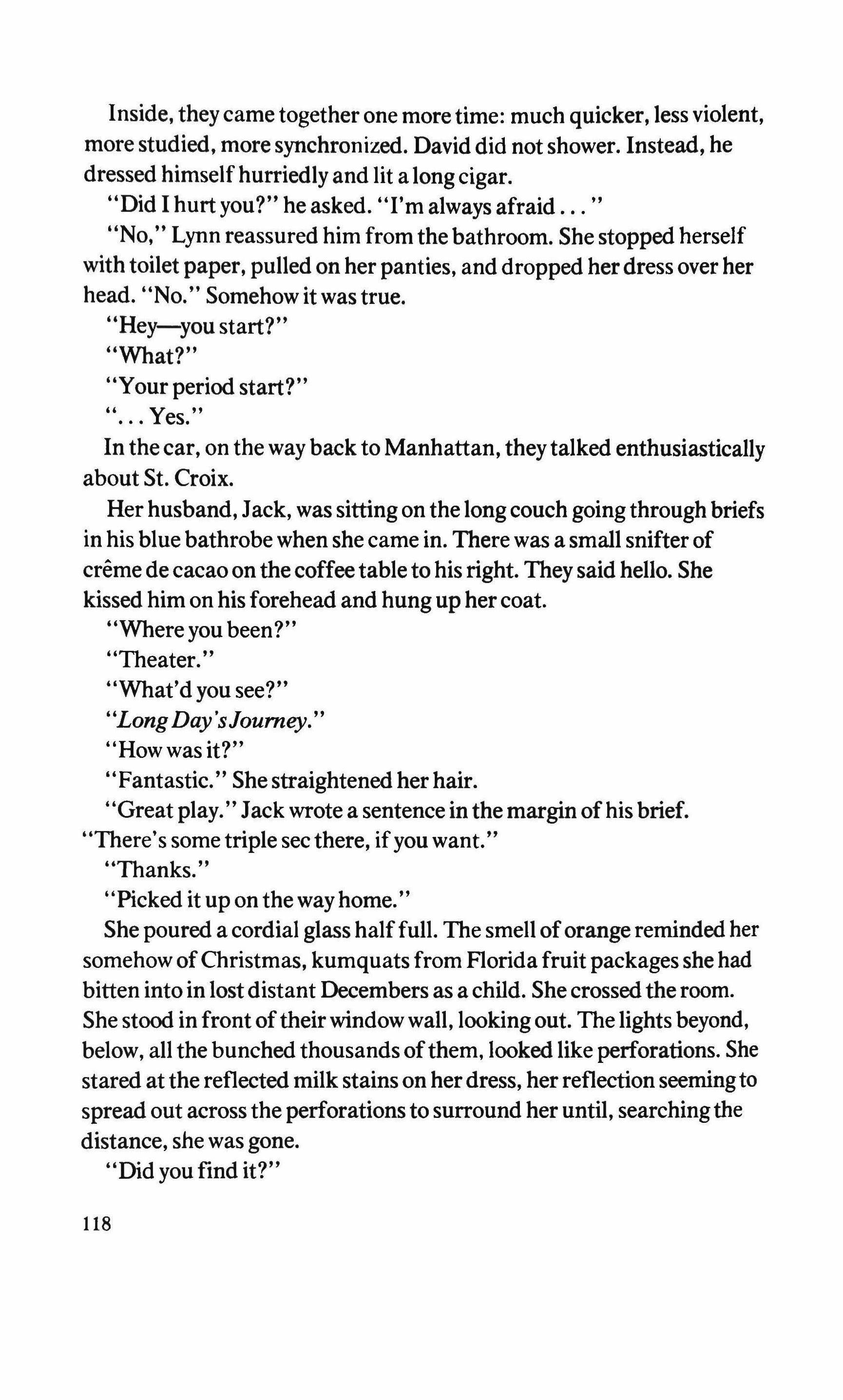
Inside, they came together one more time: much quicker, less violent, more studied, more synchronized. David did not shower. Instead, he dressed himselfhurriedly and lit a longcigar.
"Did I hurt you?" he asked. "I'm always afraid ;"
"No," Lynn reassured him from the bathroom. She stopped herself with toilet paper, pulled on her panties, and dropped herdress over her head. "No." Somehow it was true.
"Hey-you start?"
"What?"
"Your period start?" Yes."
In the car, on the way back to Manhattan, theytalked enthusiastically about St. Croix.
Her husband, Jack, was sitting on the long couch goingthrough briefs in his blue bathrobe when she came in. There was a small snifter of creme de cacao on the coffeetable to his right. They said hello. She kissed him on his forehead and hung up her coat.
"Where you been?"
"Theater.
"What'd you see?"
"LongDay'sJourney."
"How was it?"
"Fantastic." She straightened her hair.
"Great play." Jack wrote a sentence in the margin of his brief. "There's some triple sec there, ifyou want."
"Thanks."
"Picked it up on the way home."
She poured a cordial glass halffull. The smell oforange reminded her somehow ofChristmas, kumquats from Florida fruit packages she had bitten intoin lost distant Decembers as a child. She crossed the room. She stood in front oftheirwindow wall, looking out. The lightsbeyond, below, all the bunched thousands ofthem, looked like perforations. She stared at the reflected milk stains on herdress, her reflection seemingto spread out across the perforations to surround her until, searchingthe distance, she was gone.
"Did you find it?"
118
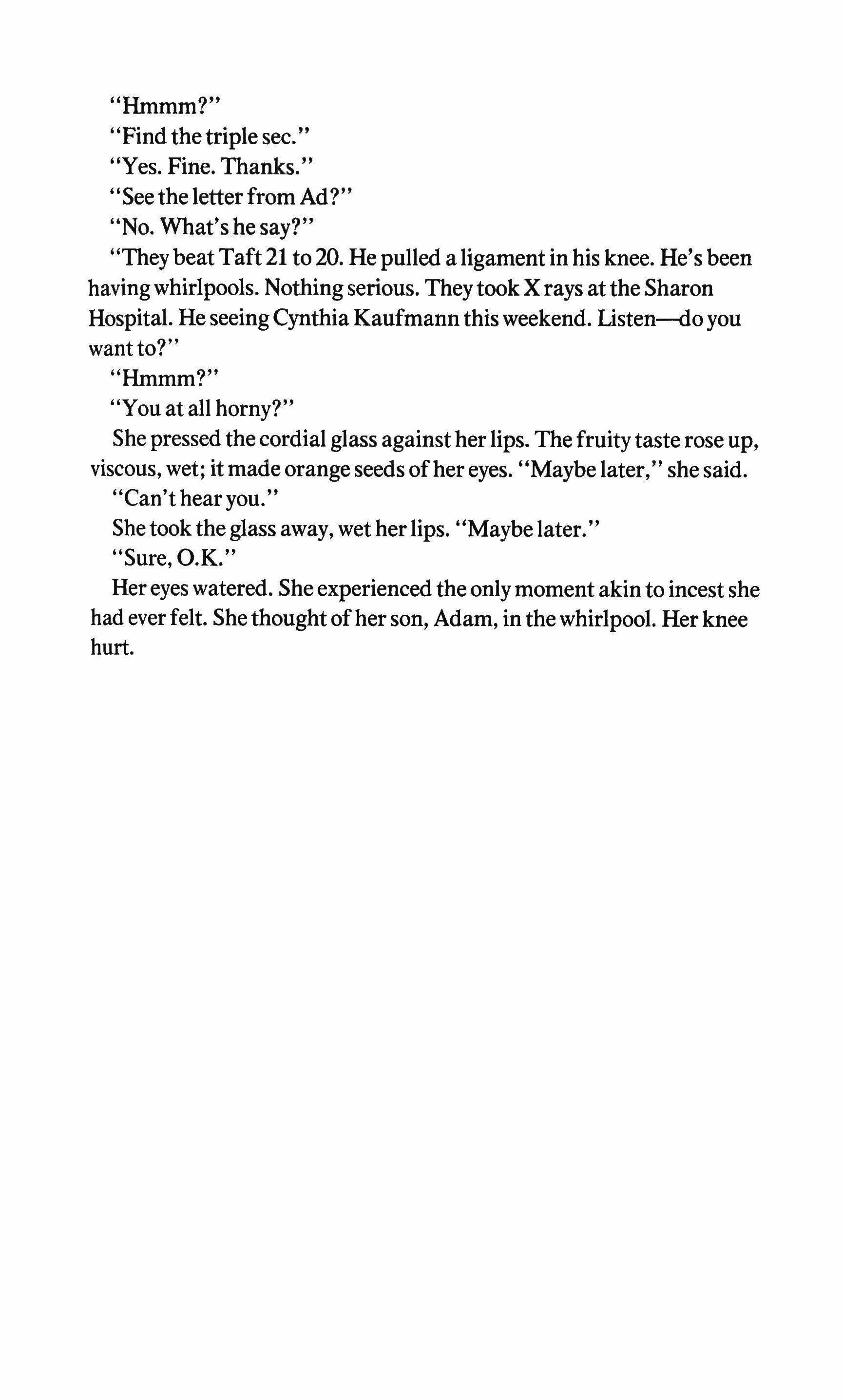
"Hmmm?"
"Find the triple sec."
"Yes. Fine. Thanks."
"See the letter from Ad?"
"No. What's he say?"
"Theybeat Taft 21 to 20. He pulled a ligament in his knee. He's been havingwhirlpools. Nothing serious. Theytook X rays at the Sharon Hospital. He seeingCynthia Kaufmann this weekend. Listen=-do you want to?"
"Hmmm?"
"You at all horny?"
She pressed the cordial glass against her lips. The fruity taste rose up, viscous, wet; it made orange seeds ofher eyes. "Maybe later," she said.
"Can't hearyou."
Shetook the glass away, wet her lips. "Maybe later."
"Sure, O.K."
Her eyes watered. She experienced the only moment akin to incest she had ever felt. She thought of her son, Adam, in the whirlpool. Her knee hurt.
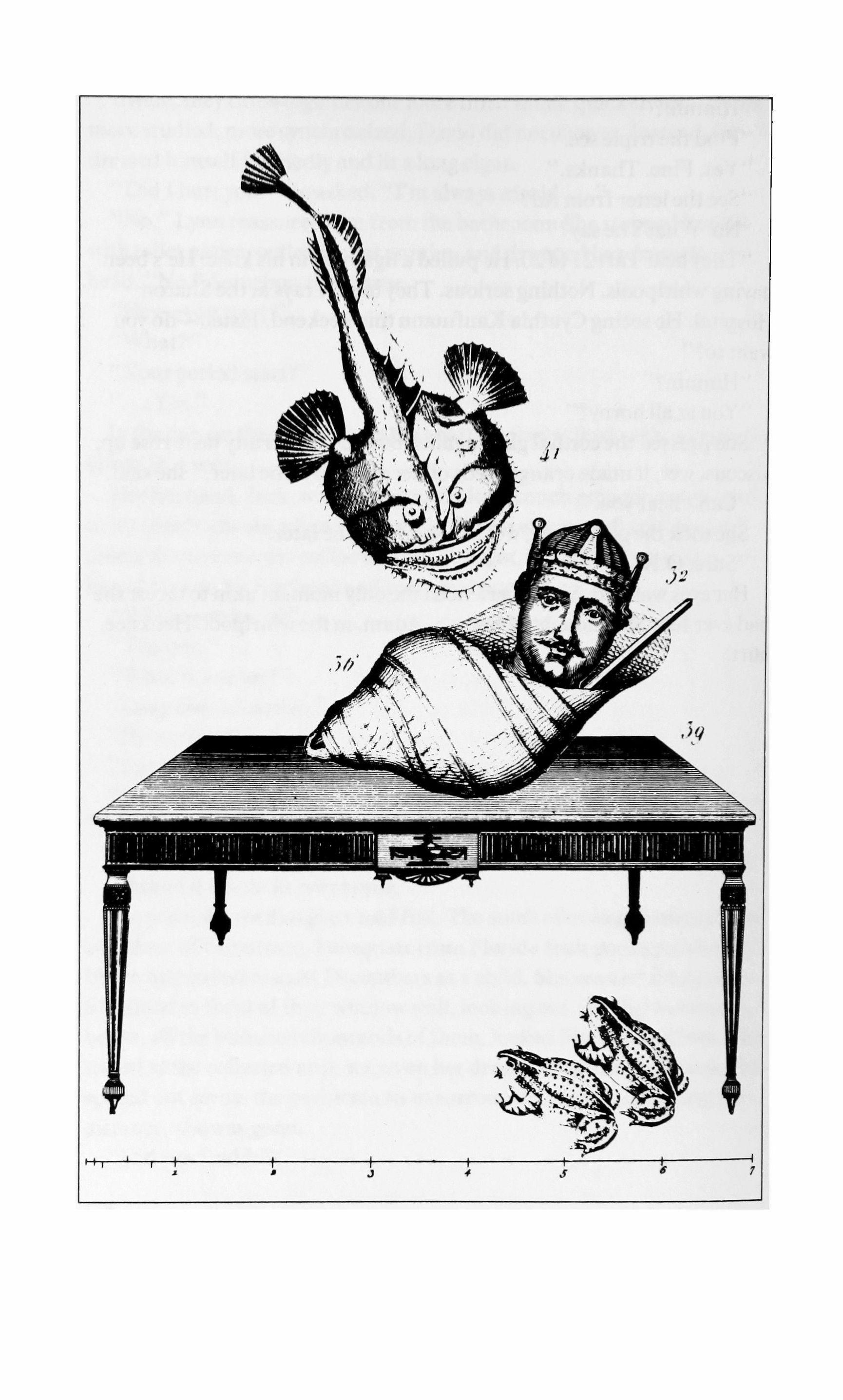
The man who swam through jellyfish, through men-of-war
Robert Onopa
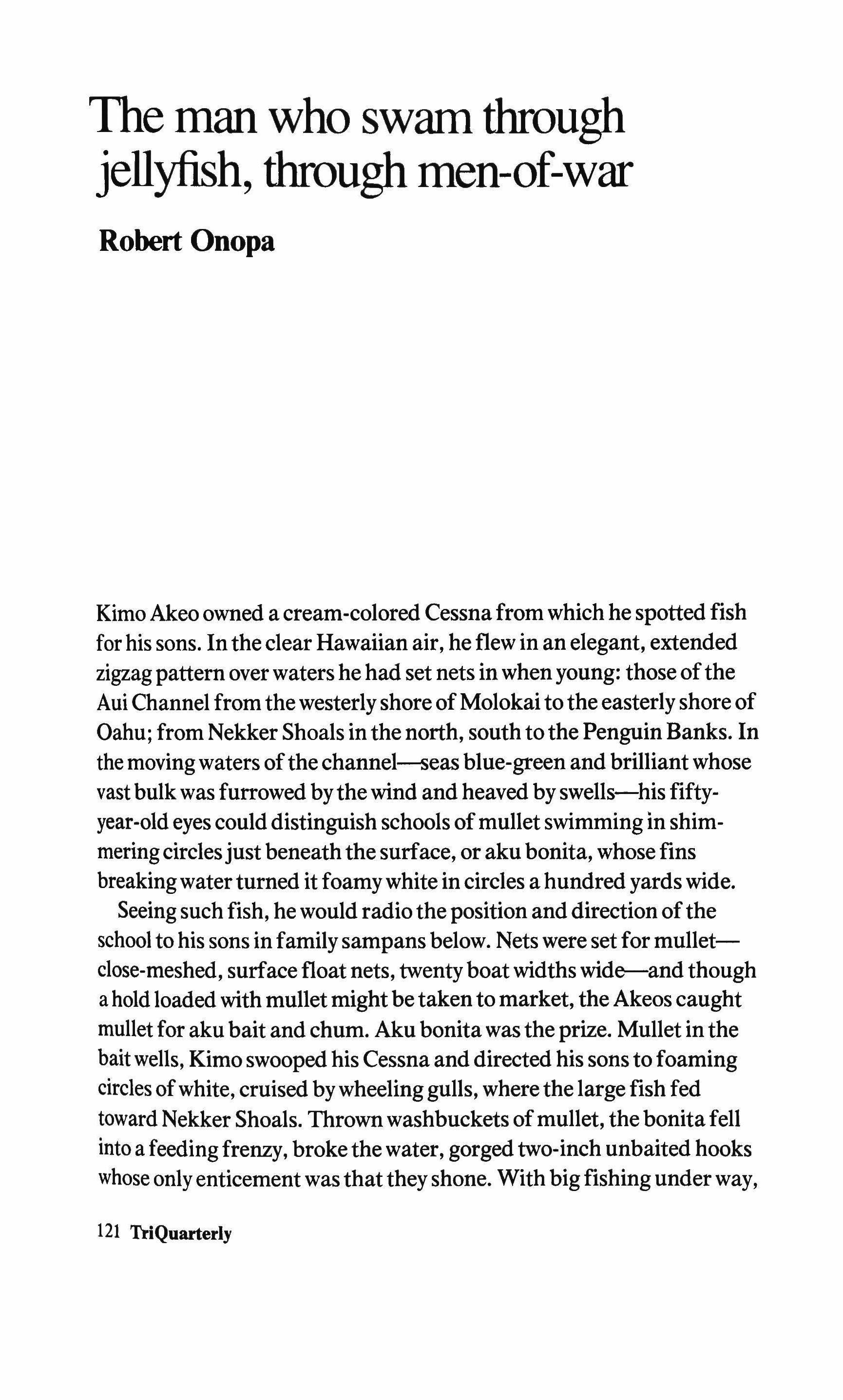
Kimo Akeo owned a cream-colored Cessna from which he spotted fish for his sons. In the clear Hawaiian air, he flew in an elegant, extended zigzagpattern over waters he had set nets inwhenyoung: those ofthe Aui Channel fromthewesterlyshore ofMolokai to the easterly shore of Oahu; from Nekker Shoals in the north, south to the Penguin Banks. In the movingwaters ofthe channel--seas blue-green and brilliant whose vast bulk was furrowed bythewind and heaved byswells-his fiftyyear-old eyes could distinguish schools ofmullet swimming in shimmeringcirclesjust beneaththe surface, or aku bonita, whose fins breaking water turned it foamywhite in circles a hundred yards wide. Seeing such fish, he would radio the position and direction ofthe school to his sons infamily sampans below. Nets were set for mulletclose-meshed, surface float nets, twenty boatwidths wide-and though a hold loaded with mullet might be taken to market, the Akeos caught mullet for aku bait and chum. Aku bonita was the prize. Mullet in the baitwells, Kimo swooped his Cessna and directed his sons to foaming circles ofwhite, cruised bywheelinggulls, wherethe large fish fed toward Nekker Shoals. Thrownwashbuckets ofmullet, thebonitafell into a feedingfrenzy, broke the water, gorged two-inch unbaited hooks whose onlyenticement was thattheyshone. With bigfishing underway, 121 TriQuarterly

Kimo Akeo, who had swung fish back into the hold for thirtyyears himself, would circle once in a wide graceful arc, last glimpse money being made, and settle to cruising either island's coast.
From the air, the coastlines were patterns ofcoral, reefs outlined, rip currents and tidal pulls streaking the water-whose color changed from sky blue to violet, from ice blue to white, as the currents carried it over live reefs, past meandering sand spits miles wide, pastpoints, through the surfbreak, and finally to the sea-green deeps where the aku swam. Some days, offOahu, he could see two-hundred-pound ulua lolling in the shallow sub-reef, the sun glittering offtheir silverybacks; off Molokai, vast stretches ofempty sand peppered with the shifting shadows ofcrabs, vast flocks ofbirds, like dust in the sun offthe roadless westerly coast; or near the sea change between the islands in winter, schools oftwenty or more blue whales, massive and graceful as swells, sounding as they rounded toward the leeward coast of Oahu, runningtoward open sea.
"There's a plane down there. A small airplane. You can see it," Harriet Kunen said, tryingboth to get her husband's attention and to keep hereyes fixed on what she saw fromthe oblongwindow ofthe huge aircraft. "Cy, you have to look. There are whales, in front ofit. You can see them, you have to look."
Cy Kunen reluctantlystuffed his magazine into the seat pocket before his knees and undid the seat belt he had fastened whentheyhad begun their final descent; gawkingannoyed him. They were down to three thousand feet now, minutes away from landing in Honolulu, approaching over the Aui Channel. "By Christ ," he muttered finally, craned to the window. "Christ, that plane is low."
"Like it's landing," said Harriet. "Those splashes are whales, aren't they, Cy?"
"No, I Already the light plane and the fish it followed were passing from the middle ofthe window aft. "Did you see that stream shoot up? I'll betthose are whales. Christ."
"That plane is in the water, Cy."
"It must be a seaplane."
"Cy, you'recrushing my dress. That plane landed in thewater."
122
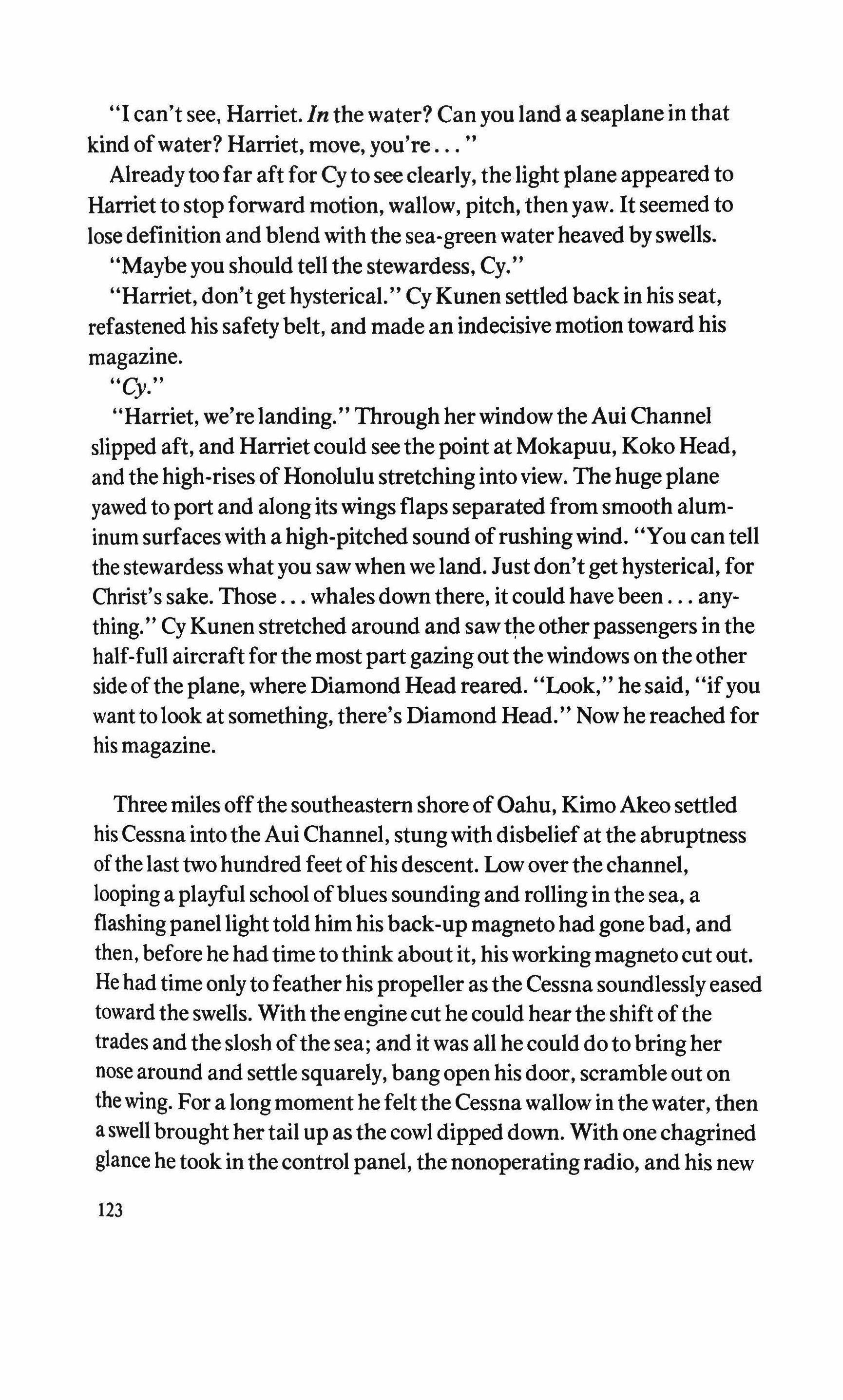
"I can't see, Harriet. In the water? Can you land a seaplane in that kind ofwater? Harriet, move, you're
Already too far aft for Cyto see clearly, the lightplaneappeared to Harriet to stop forward motion, wallow, pitch, then yaw. It seemed to lose definition and blend with the sea-green water heaved byswells.
"Maybe you should tell the stewardess, Cy."
"Harriet, don't gethysterical." Cy Kunen settled back in his seat, refastened his safetybelt, and made an indecisive motion toward his magazine.
"ey."
"Harriet, we're landing." Through herwindowthe Aui Channel slipped aft, and Harriet could see the point at Mokapuu, Koko Head, and the high-rises ofHonolulu stretching intoview. The hugeplane yawed to port and alongits wingsflapsseparated from smooth aluminum surfaceswith a high-pitched sound ofrushing wind. "You can tell the stewardesswhat you saw when we land. Just don't gethysterical, for Christ's sake. Those whales down there, it could have been anything." Cy Kunen stretched around and saw the other passengers in the half-full aircraft for the most partgazingout thewindows on the other side ofthe plane, where Diamond Head reared. "Look," he said, "ifyou want to look at something, there's Diamond Head." Now he reached for his magazine.
Three miles offthe southeastern shore of Oahu, Kimo Akeo settled his Cessna into the Aui Channel, stungwith disbelief at the abruptness ofthelast two hundred feet ofhis descent. Low over thechannel, looping a playful school ofblues sounding and rolling in the sea, a flashingpanellighttold him his back-up magneto had gone bad, and then, before he hadtime to think about it, hisworkingmagneto cut out. He had time onlyto feather his propeller as the Cessna soundlessly eased toward the swells. Withthe engine cut he could hearthe shift ofthe trades and the slosh ofthe sea; and it was all he could do to bringher nose around and settle squarely, bang open his door, scramble out on thewing. For a long moment he feltthe Cessna wallow in thewater, then a swell brought hertail up as the cowl dipped down. With one chagrined glance he took in the control panel, the nonoperatingradio, and his new
123
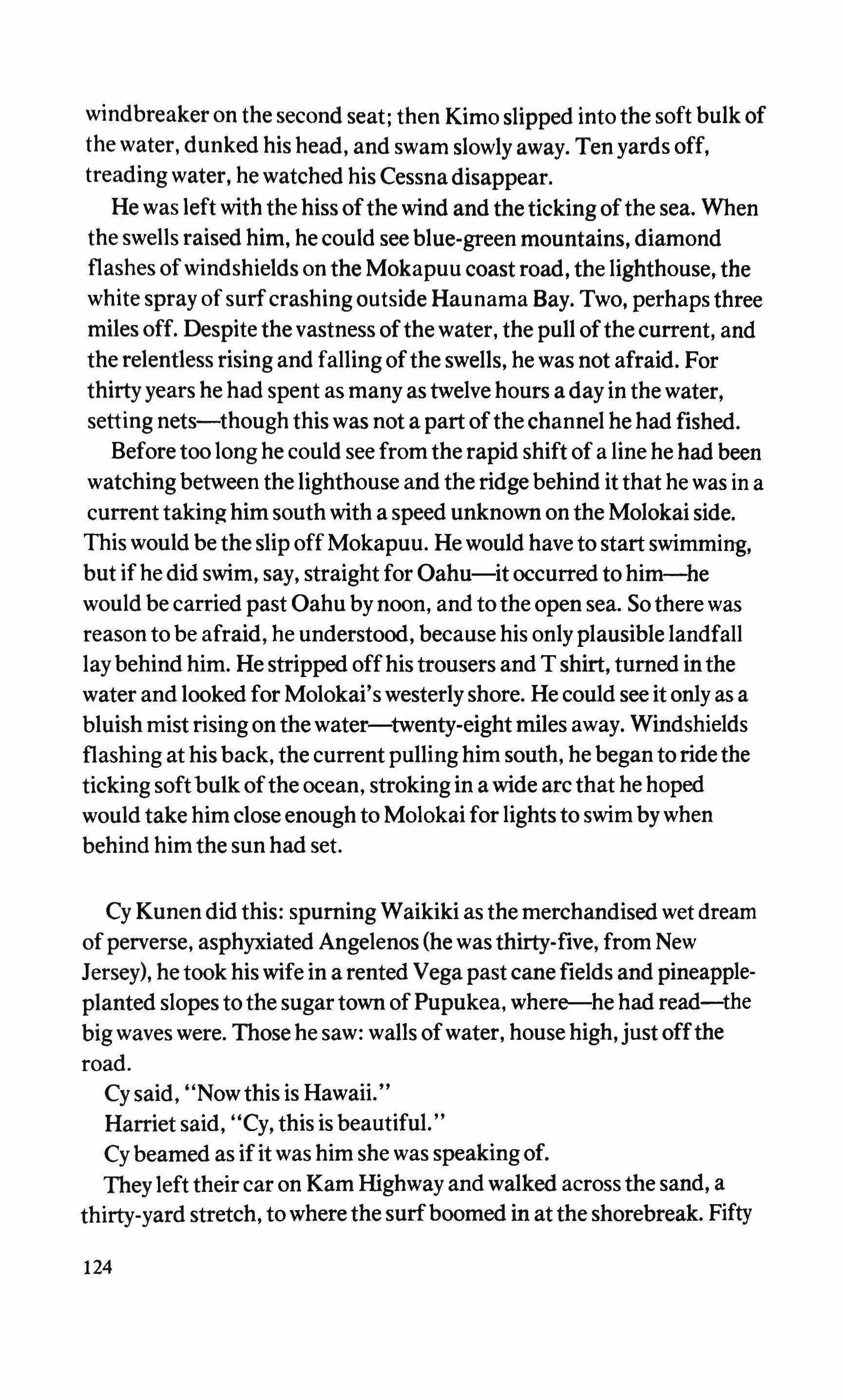
windbreaker on the second seat; then Kimo slipped into the soft bulk of the water, dunked his head, and swam slowly away. Ten yards off, treading water, he watched his Cessnadisappear. He was left with the hiss ofthe wind and theticking ofthe sea. When the swells raised him, he could see blue-green mountains, diamond flashes ofwindshields on the Mokapuu coast road, the lighthouse, the white spray of surfcrashing outside Haunama Bay. Two, perhaps three miles off. Despite the vastness ofthe water, the pull ofthe current, and the relentless rising and fallingofthe swells, he was not afraid. For thirty years he had spent as many as twelve hours a dayin the water, settingnets-though this was not a part ofthe channel he had fished. Before too long he could see from the rapid shift of a line he had been watching between the lighthouse and the ridge behind it that he was in a current taking him south with a speed unknown on the Molokai side. This would be the slip offMokapuu. Hewould have to start swimming, but ifhe did swim, say, straight for Oahu-it occurred to him-he would be carried past Oahu by noon, and tothe open sea. Sothere was reason to be afraid, he understood, because his onlyplausible landfall laybehind him. He stripped offhis trousers and T shirt, turned inthe water and looked for Molokai'swesterly shore. He could see it only as a bluish mist rising on thewater-twenty-eightmiles away. Windshields flashing at his back, the current pullinghim south, he began to ridethe ticking softbulkofthe ocean, stroking in a wide arc that he hoped would take him close enough to Molokai for lights to swim by when behind him the sun had set.
Cy Kunen did this: spuming Waikiki as the merchandised wet dream ofperverse, asphyxiated Angelenos(he was thirty-five, from New Jersey), he took his wife in a rented Vega past cane fields and pineappleplanted slopes to the sugar town ofPupukea, where-he had read-the big waves were. Those he saw: walls ofwater, house high,just offthe road.
Cysaid, "Nowthis is Hawaii."
Harriet said, "Cy, this is beautiful."
Cy beamed as ifit was him she was speakingof.
Theyleft their car on Kam Highway and walked across the sand, a thirty-yard stretch, towherethe surfboomed in at the shorebreak. Fifty
124
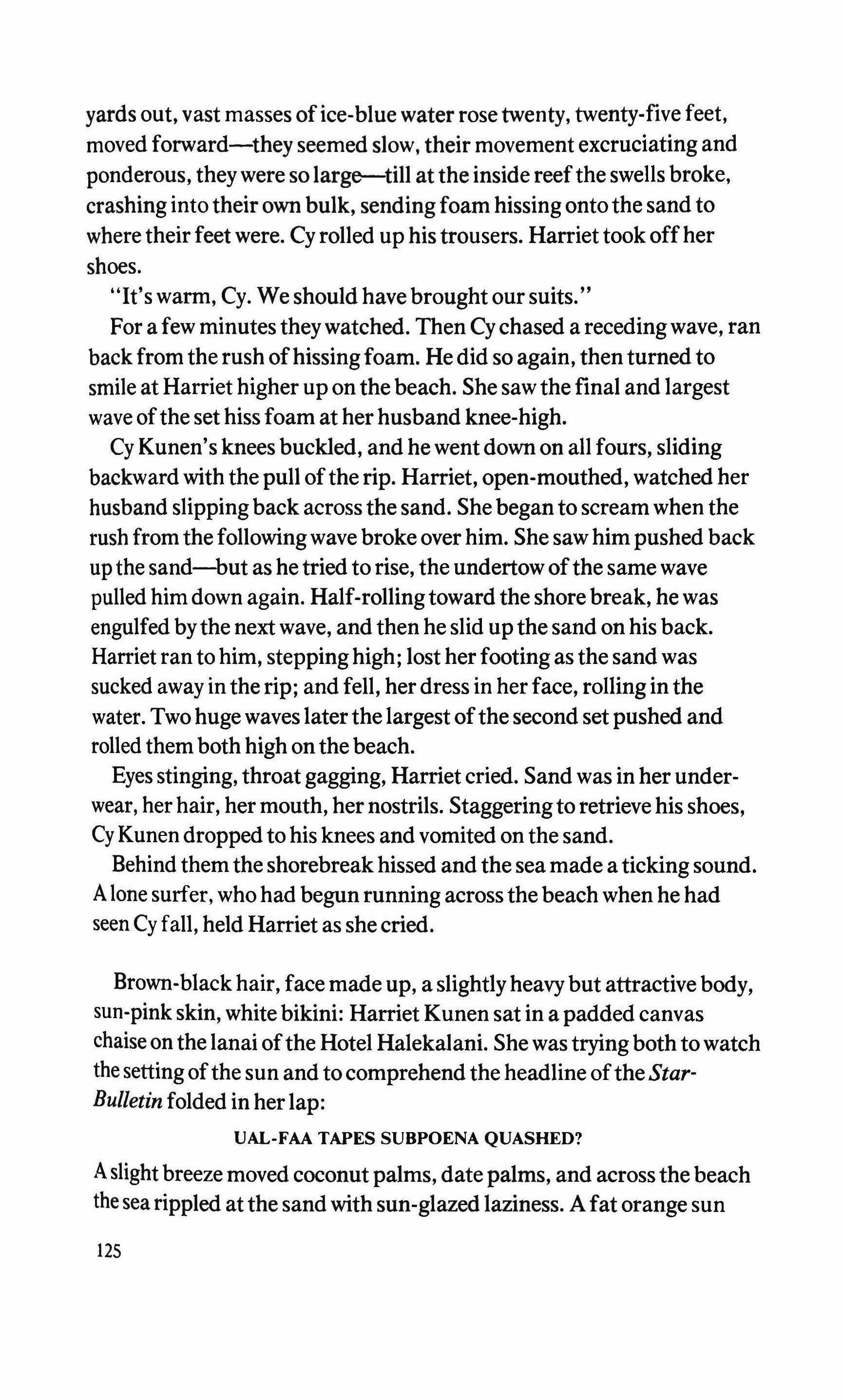
yards out, vast masses ofice-blue water rose twenty, twenty-five feet, moved forward-they seemed slow, their movement excruciating and ponderous, they were so large-till at the inside reefthe swells broke, crashing intotheir own bulk, sending foam hissing onto the sand to where their feet were. Cy rolled up his trousers. Harriet took offher shoes
It'swarm, Cy. We should have brought our suits."
For a few minutes theywatched. Then Cychased a receding wave, ran back from the rush ofhissingfoam. He did so again, then turned to smile at Harriet higher up on the beach. She saw the final and largest wave ofthe set hiss foam at herhusband knee-high.
Cy Kunen's knees buckled, and he went down on all fours, sliding backward with the pull ofthe rip. Harriet, open-mouthed, watched her husband slippingback across the sand. She began to scream when the rush from the following wave broke over him. She saw him pushed back upthe sand-but as hetried to rise, the undertowofthe same wave pulled him down again. Half-rollingtoward the shore break, he was engulfedbythe next wave, and then he slid up the sand on his back. Harriet ran to him, steppinghigh; lost her footing as the sand was sucked away in the rip; and fell, her dress in her face, rolling in the water. Two huge waves laterthe largest ofthe second set pushed and rolled them both high on the beach.
Eyes stinging, throat gagging, Harriet cried. Sand was in her underwear, herhair, her mouth, her nostrils. Staggeringto retrieve his shoes, Cy Kunen dropped to his knees and vomited on the sand.
Behind themthe shorebreak hissed and the sea made a tickingsound. Alone surfer, who had begunrunning across the beach when he had seen Cyfall, held Harriet as she cried.
Brown-black hair, face made up, a slightlyheavybut attractive body, sun-pinkskin, white bikini: Harriet Kunen sat in a padded canvas chaise on the lanai ofthe Hotel Halekalani. She was tryingboth to watch the setting ofthe sun and to comprehend the headline ofthe StarBulletin folded in herlap:
UAL-FAA TAPES SUBPOENA QUASHED?
Aslight breeze moved coconut palms, date palms, and across the beach the sea rippled at the sand with sun-glazed laziness. Afat orange sun
125
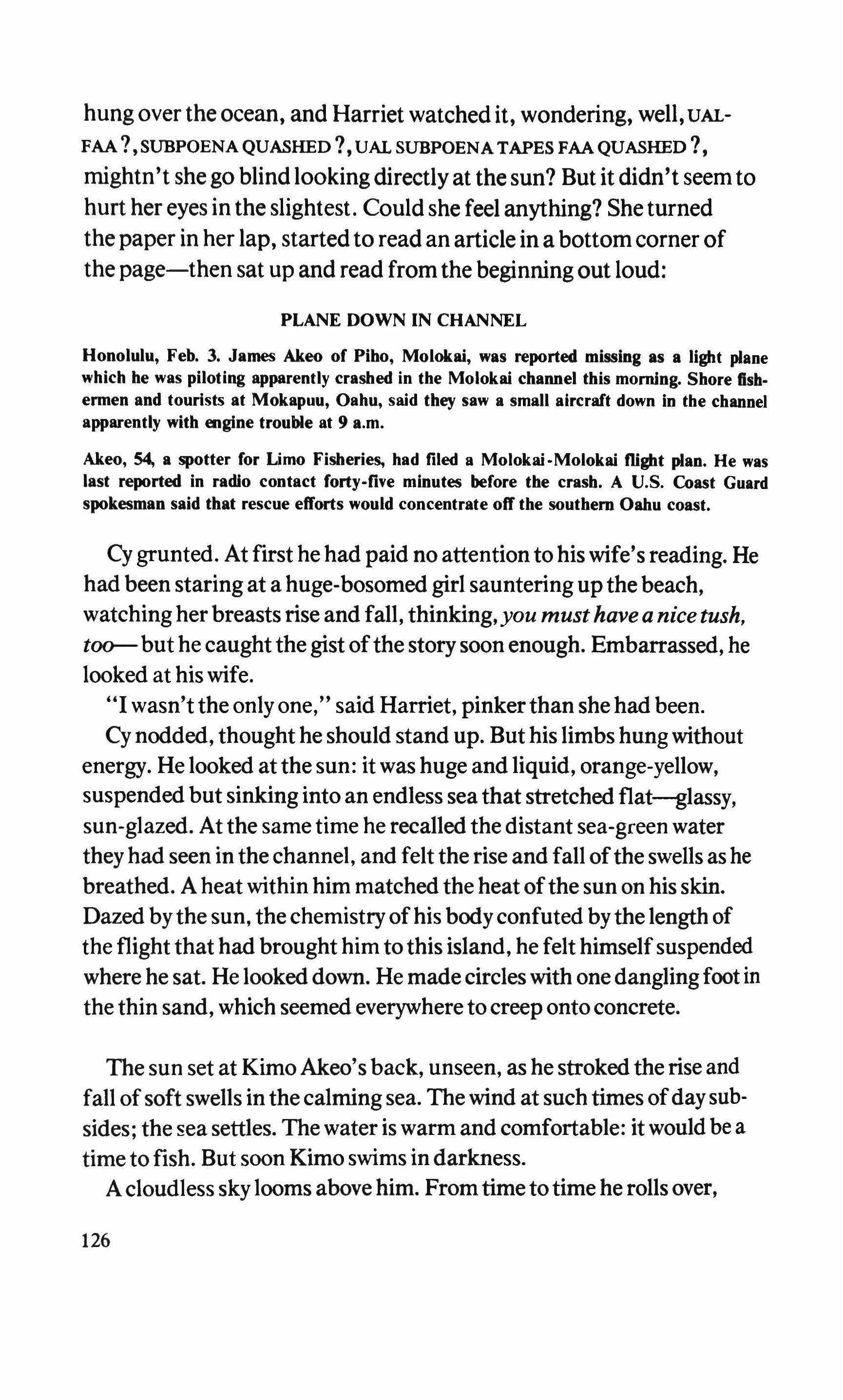
hung over the ocean, and Harriet watched it, wondering, well, UALFAA ?,SUBPOENA QUASHED ?,UAL SUBPOENA TAPES FAA QUASHED ?, mightn't she go blind lookingdirectly at the sun? But it didn't seem to hurt her eyes in the slightest. Could she feel anything? She turned the paper in her lap, started to read an article in a bottom corner of the page-then sat up and read from the beginning out loud:
PLANE DOWN IN CHANNEL
Honolulu, Feb. 3. James Akeo of Piho, Molokai, was reported missing as a light plane which he was piloting apparently crashed in the Molokai channel this morning. Shore fishermen and tourists at Mokapuu, Oahu, said they saw a small aircraft down in the channel apparently with engine trouble at 9 a.m,
Akeo, S4, a spotter for Limo Fisheries, had filed a Molokai-Molokai flight plan. He was last reported in radio contact forty-five minutes before the crash. A U.S. Coast Guard spokesman said that rescue efforts would concentrate off the southern Oahu coast.
Cygrunted. At first he had paid no attention to his wife's reading. He had been staring at a huge-bosomed girl sauntering up thebeach, watching herbreasts rise and fall, thinking,you must have a nice tush, t� but he caught the gist ofthe story soon enough. Embarrassed, he looked at his wife
I wasn't the onlyone," said Harriet, pinkerthan she had been. Cynodded, thought he should stand up. But his limbs hungwithout energy. He looked at the sun: it was huge and liquid, orange-yellow, suspended but sinking into an endless sea that stretched flat-glassy, sun-glazed. At the same time he recalled the distant sea-green water theyhad seen in the channel, and felt the rise and fall ofthe swells as he breathed. A heat within him matched the heat ofthe sun on his skin. Dazed bythe sun, the chemistryofhis bodyconfuted bythe length of the flight that had brought him to this island, he felt himselfsuspended where he sat. He looked down. He made circleswith one danglingfoot in the thin sand, which seemed everywhere to creep onto concrete.
The sun set at Kimo Akeo's back, unseen, as he stroked the rise and fall ofsoft swells inthe calming sea. The wind at such times ofdaysubsides; the sea settles. The water is warm and comfortable: it would be a time to fish. But soon Kimo swims in darkness. Acloudless sky looms above him. From time to time he rolls over,
126
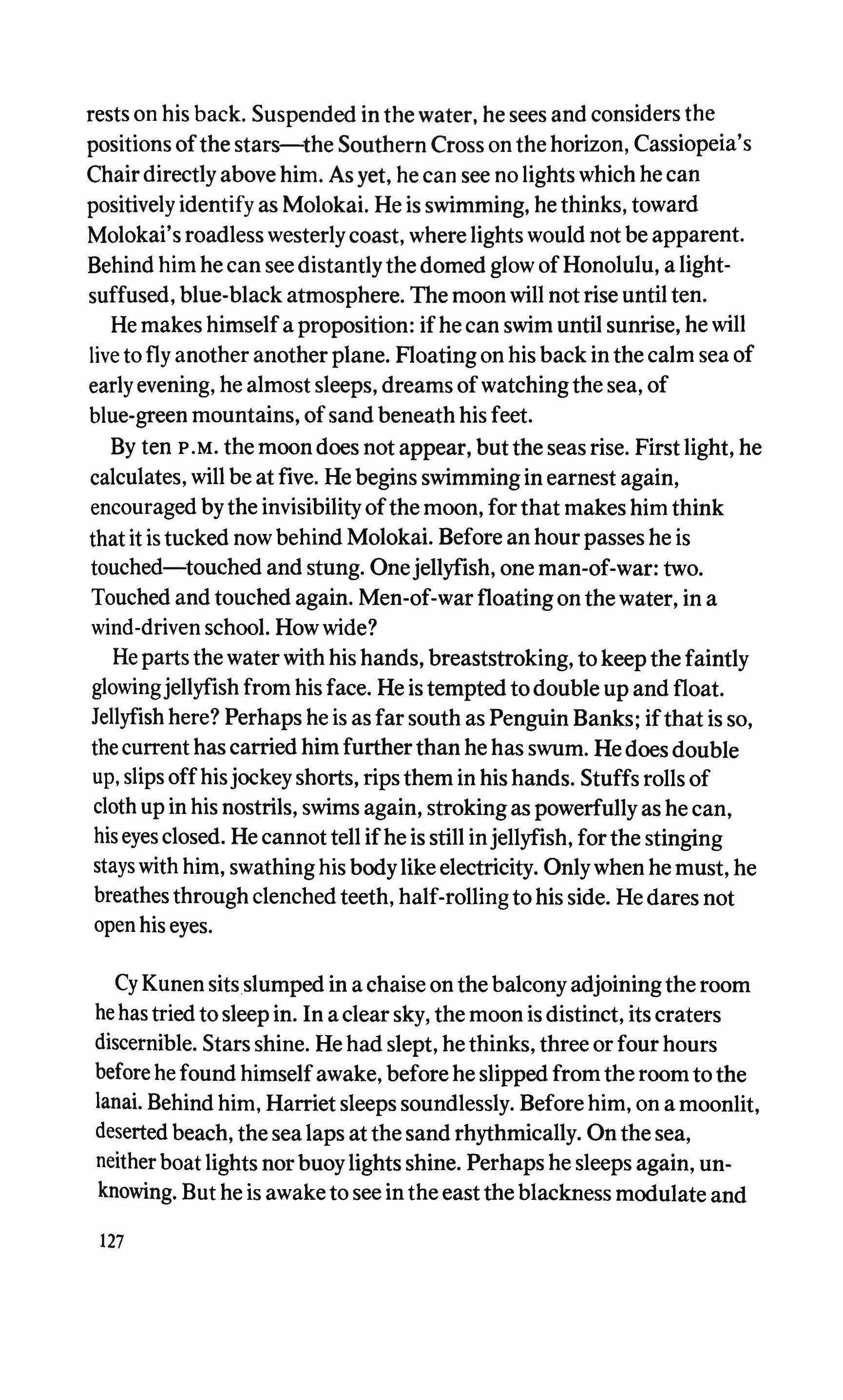
rests on his back. Suspended in the water, he sees and considers the positions ofthe stars-the Southern Cross on the horizon, Cassiopeia's Chairdirectly above him. As yet, he can see no lights which he can positivelyidentify as Molokai. He is swimming, he thinks, toward Molokai's roadless westerly coast, where lights would not be apparent. Behind him he can see distantlythe domed glow ofHonolulu, a lightsuffused, blue-black atmosphere. The moon will not rise until ten.
He makes himself a proposition: if he can swim until sunrise, he will live to fly another anotherplane. Floating on his back in the calm sea of earlyevening, he almost sleeps, dreams ofwatchingthe sea, of blue-green mountains, ofsand beneath his feet.
By ten P.M. the moon does not appear, butthe seas rise. First light, he calculates, will be at five. He begins swimming in earnest again, encouragedbythe invisibility ofthe moon, forthat makes him think that it istucked now behind Molokai. Before an hour passes he is touched-touched and stung. Onejellyfish, one man-of-war: two. Touched and touched again. Men-of-war floating on thewater, in a wind-driven school. Howwide?
He parts the water with his hands, breaststroking, to keep the faintly glowingjellyfish from his face. He is tempted to double up and float. Jellyfish here? Perhaps he is as far south as Penguin Banks; ifthat is so, the current has carried himfurtherthan he has swum. He does double up, slips offhisjockeyshorts, ripsthem in his hands. Stuffs rolls of cloth up in his nostrils, swims again, stroking as powerfully as he can, his eyes closed. He cannot tell ifhe is still injellyfish, forthe stinging stayswith him, swathinghis body like electricity. Onlywhen he must, he breathes through clenched teeth, half-rolling to his side. He dares not open his eyes.
Cy Kunen sitsslumped in a chaise on the balconyadjoiningthe room he has tried to sleep in. In a clear sky, the moon is distinct, its craters discernible. Stars shine. He had slept, he thinks, three or four hours before he found himselfawake, before he slipped from the room to the lanai. Behind him, Harriet sleeps soundlessly. Before him, on a moonlit, deserted beach, the sea laps at the sand rhythmically. On the sea, neitherboat lights nor buoylights shine. Perhaps he sleepsagain, unknowing. But he is awake to see inthe east the blackness modulate and
127
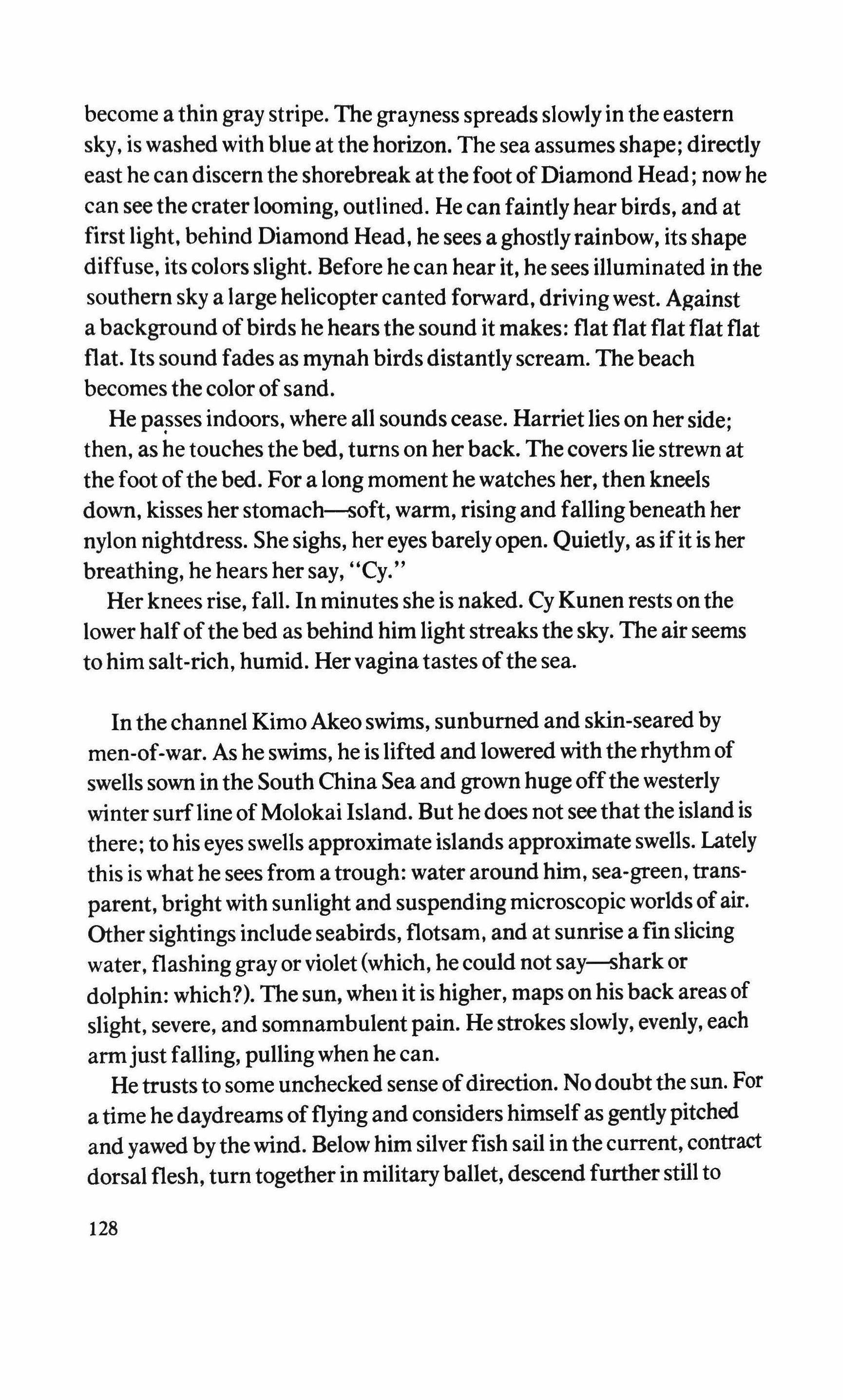
become a thin gray stripe. The grayness spreadsslowlyin the eastern sky, is washed with blue at the horizon. The sea assumes shape; directly east he can discern the shorebreak at the foot ofDiamond Head; now he can see the crater looming, outlined. He can faintlyhear birds, and at first light, behind Diamond Head, he sees a ghostlyrainbow, its shape diffuse, its colors slight. Before he can hear it, he sees illuminated in the southern sky a largehelicopter canted forward, driving west. Against a background ofbirds he hears the sound it makes: flat flat flat flat flat flat. Its sound fades as mynah birds distantly scream. The beach becomes the color ofsand.
He pa.sses indoors, where all sounds cease. Harriet lies on her side; then, as he touches the bed, turns on her back. The covers lie strewn at the foot ofthe bed. For a long moment he watches her, then kneels down, kisses her stomach-soft, warm, rising and falling beneath her nylon nightdress. She sighs, her eyes barelyopen. Quietly, as ifit is her breathing, he hears her say, "Cy."
Her knees rise, fall. In minutes she is naked. Cy Kunen rests on the lower halfofthe bed as behind him light streaks the sky. The air seems to him salt-rich, humid. Her vagina tastes ofthe sea.
In the channel Kimo Akeo swims, sunburned and skin-seared by men-of-war. As he swims, he is lifted and lowered with the rhythm of swells sown in the South China Sea and grown huge offthe westerly winter surfline of Molokai Island. But he does not see that the island is there; to his eyes swells approximate islands approximate swells. Lately this is what he sees from a trough: water around him, sea-green, transparent, bright with sunlight and suspendingmicroscopic worlds ofair. Other sightings include seabirds, flotsam, and at sunrise a fln slicing water, flashing gray or violet (which, he could not say-shark or dolphin: which?). The sun, when it is higher, maps on his back areas of slight, severe, and somnambulent pain. He strokes slowly, evenly, each arm justfalling, pulling when he can.
He trusts to some unchecked sense ofdirection. No doubt the sun. For a time he daydreams offlying and considers himself as gentlypitched and yawed bythewind. Below him silver fish sail in the current, contract dorsal flesh, turn together in militaryballet, descend further still to
128
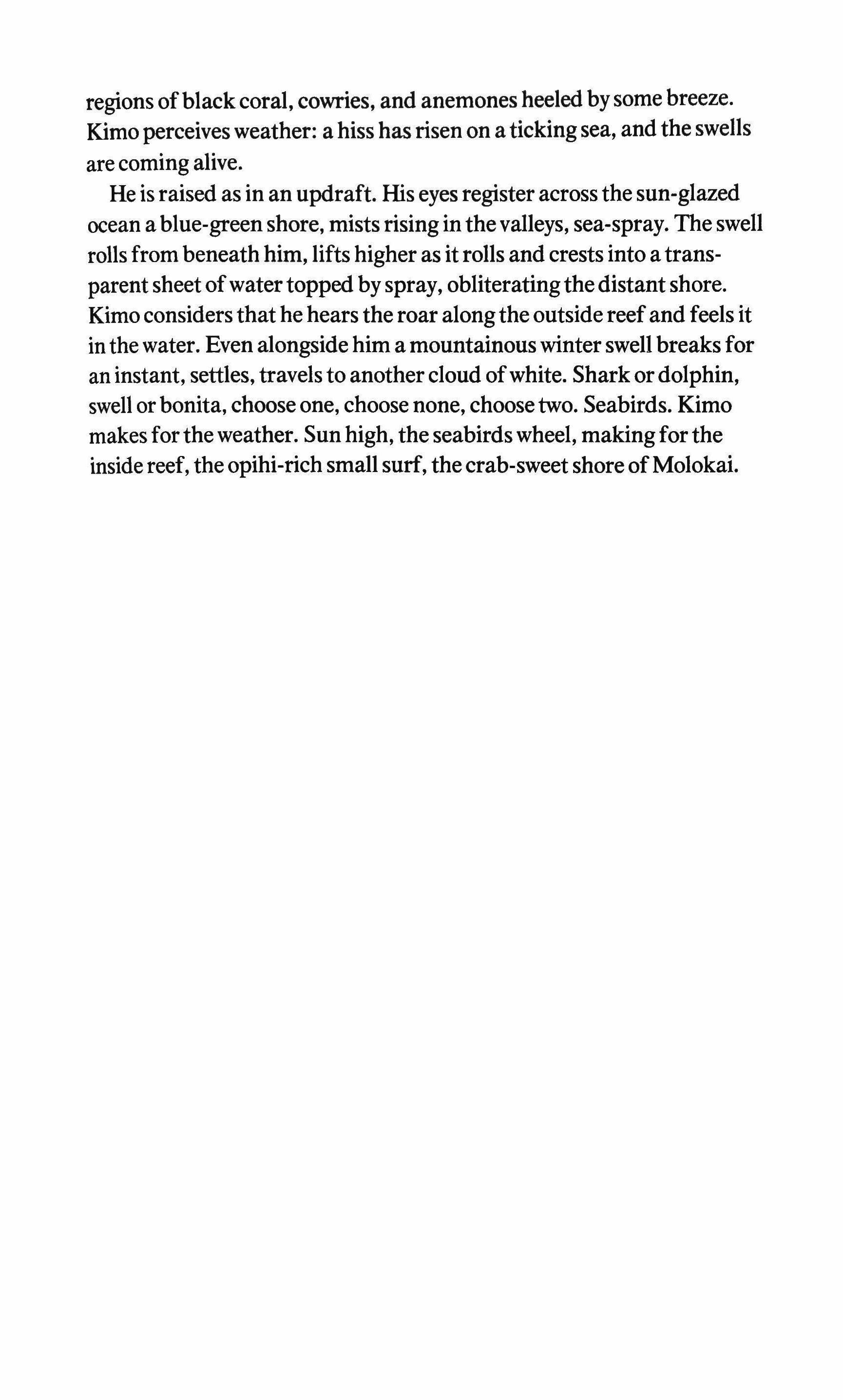
regions ofblack coral, cowries, and anemones heeled by some breeze. Kimo perceives weather: a hiss has risen on a ticking sea, and the swells are coming alive.
He is raised as in an updraft. His eyes register across the sun-glazed ocean a blue-greenshore, mists rising inthevalleys, sea-spray. The swell rolls from beneath him, lifts higher as it rolls and crests into a transparent sheet ofwater toppedby spray, obliteratingthedistant shore. Kimo considers that he hears the roar alongthe outside reefand feels it inthe water. Even alongside him a mountainous winter swell breaks for an instant, settles, travels to another cloud ofwhite. Shark or dolphin, swell or bonita, choose one, choose none, choose two. Seabirds. Kimo makes fortheweather. Sun high, the seabirdswheel, makingforthe insidereef, the opihi-rich small surf, thecrab-sweet shore ofMolokai.
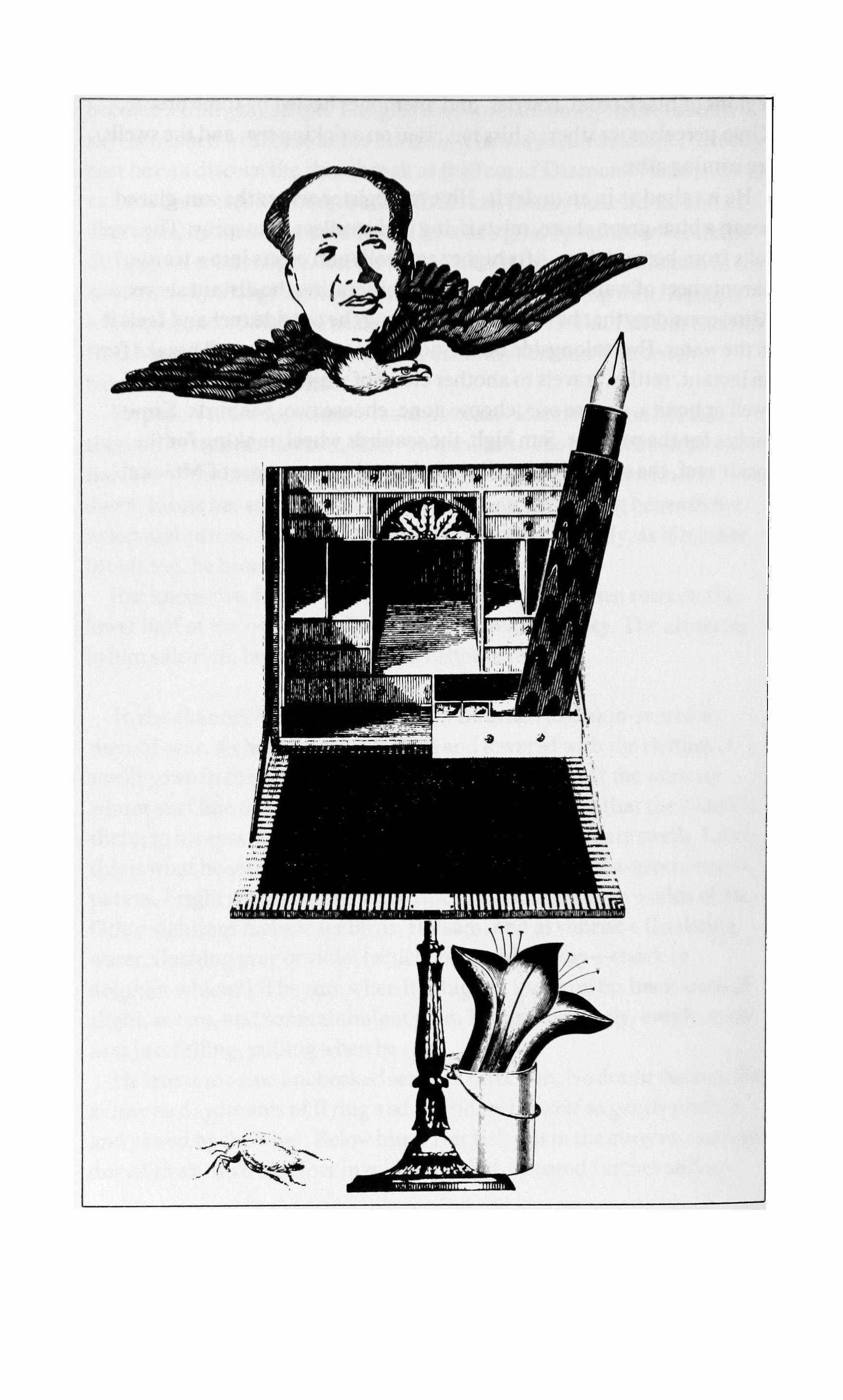
Letter from Mao to Malraux
Frederic Tuten
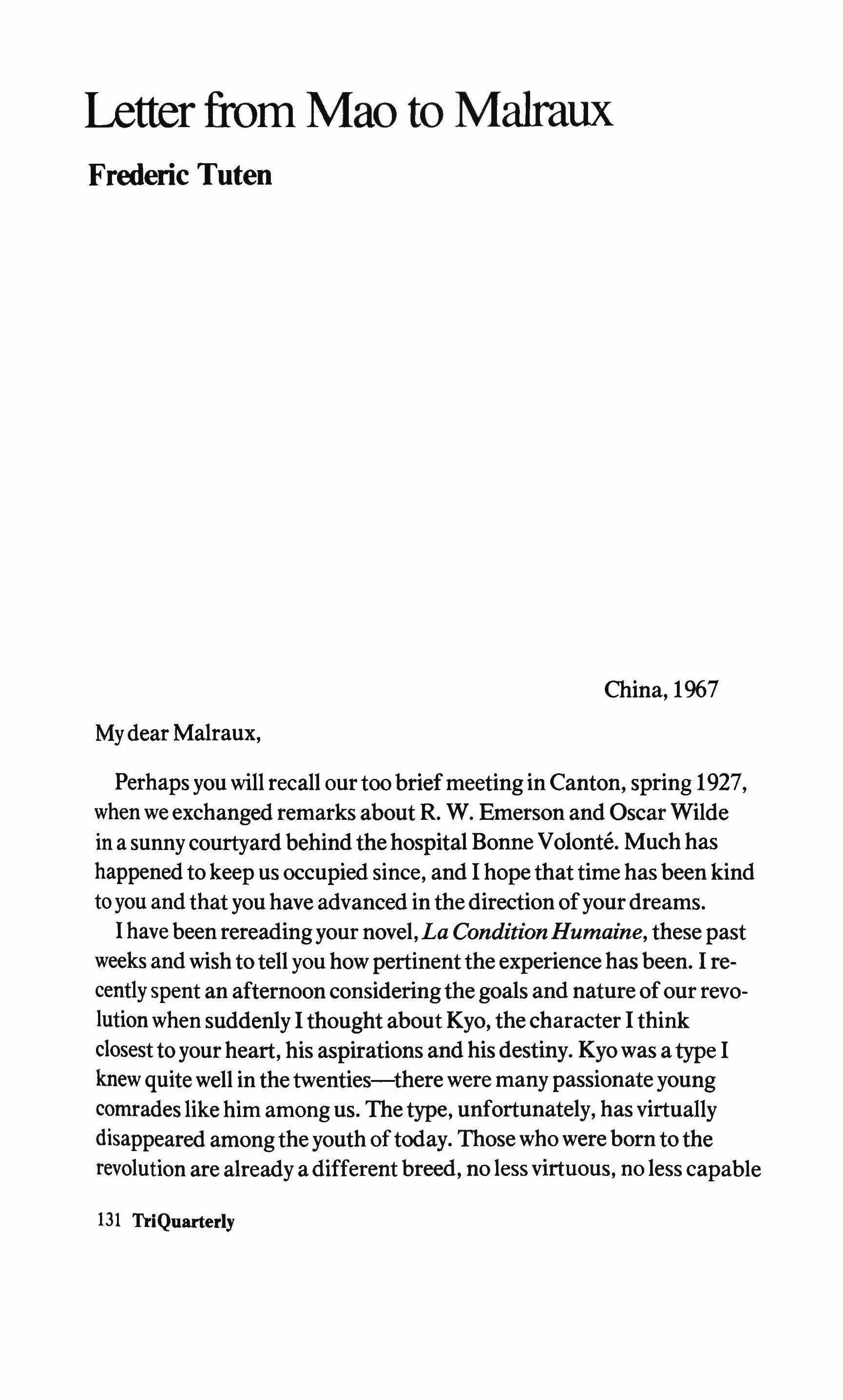
China, 1967
Mydear Malraux,
Perhaps you will recall our too briefmeeting in Canton, spring 1927, when we exchanged remarks about R. W. Emerson and Oscar Wilde in a sunny courtyard behind thehospital Bonne Volonte, Much has happened to keep us occupied since, and I hopethat time has been kind to you and that you have advanced in thedirection ofyour dreams. I have been rereadingyour novel,La ConditionHumaine, these past weeks and wish to tell you how pertinentthe experience has been. I recentlyspent an afternoon consideringthe goals and nature of our revolution when suddenly I thought about Kyo, thecharacter I think closesttoyour heart, his aspirations and his destiny. Kyo was a type I knew quitewell in thetwenties-there were many passionate young comrades like him among us. The type, unfortunately, has virtually disappeared amongtheyouth oftoday. Those who were born to the revolution are already a different breed, no less virtuous, no less capable
TriQuarterly
131
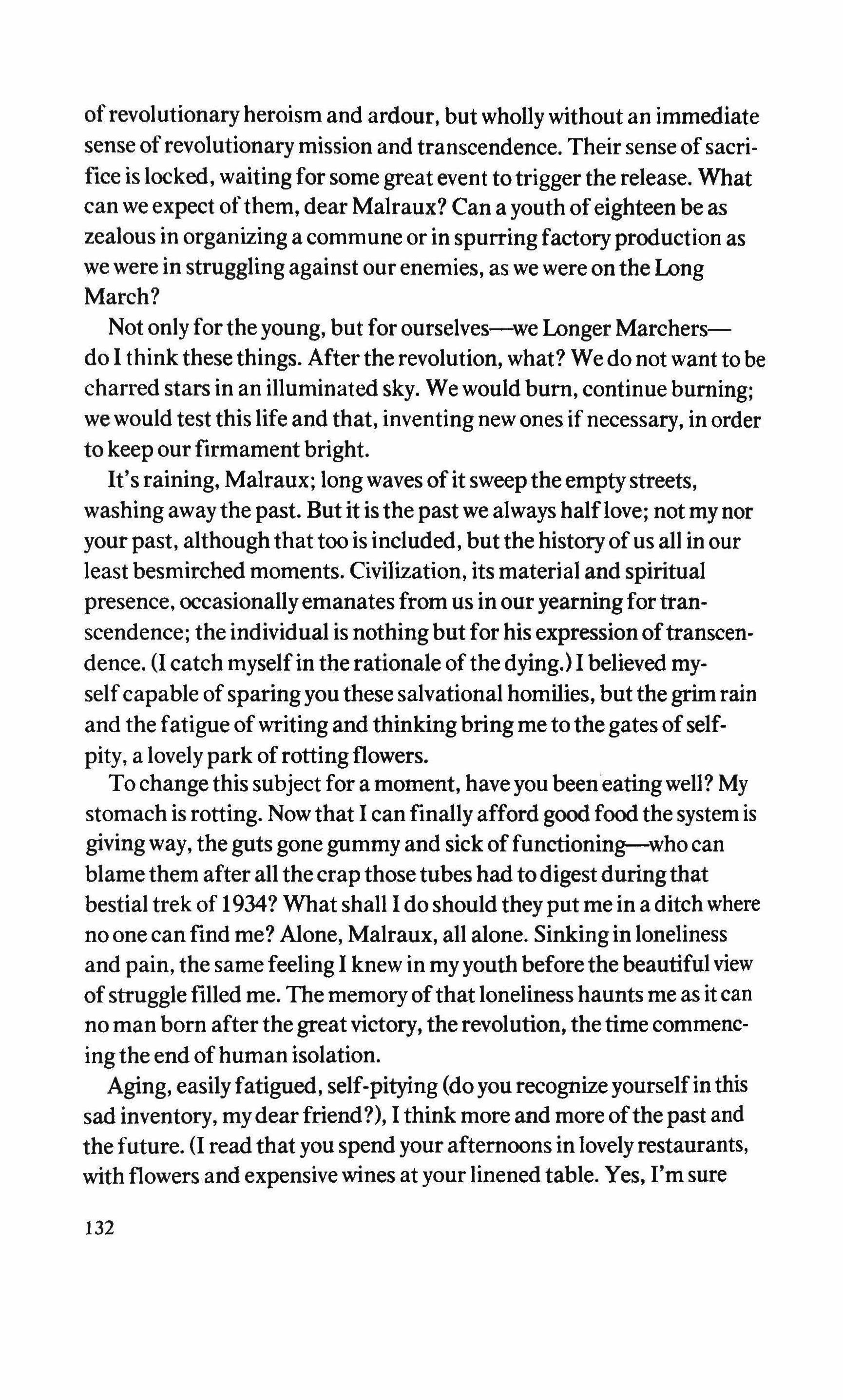
ofrevolutionary heroism and ardour, but wholly without an immediate sense ofrevolutionary mission and transcendence. Their sense of sacrifice is locked, waiting for some great event to trigger the release. What can we expect ofthem, dear Malraux? Can a youth ofeighteen be as zealous in organizing a comm une or in spurringfactoryproduction as we were in strugglingagainst our enemies, as we were on the Long March?
Not only forthe young, but for ourselves-we Longer Marchersdo I think these things. After the revolution, what? We do not want to be charred stars in an illuminated sky. We would burn, continue burning; we would test this life and that, inventing new ones if necessary, in order to keep our firmament bright.
It's raining, Malraux; long waves ofit sweep the empty streets, washing away the past. But it isthe past we always halflove; not my nor your past, although that too is included, butthe history of us all in our least besmirched moments. Civilization, its material and spiritual presence, occasionallyemanates from us in our yearningfor transcendence; the individual is nothingbutfor his expressionoftranscendence. (I catch myselfin the rationale of the dying.) I believed myselfcapable ofsparingyou these salvational homilies, but the grim rain and the fatigue ofwriting and thinkingbring me to thegates ofselfpity, a lovelypark ofrottingflowers.
To change this subject for a moment, have you beeneatingwell? My stomach is rotting. Now that I can finally afford good food the system is giving way, the guts gone gummy and sick offunctioning-who can blame them after all thecrap those tubes had to digestduringthat bestial trek of 1934? What shall I do should theyput me in a ditch where no one can find me? Alone, Malraux, all alone. Sinking in loneliness and pain, the same feeling I knew in my youth before the beautiful view ofstruggle filled me. The memoryofthat loneliness haunts me as it can no man born after the greatvictory, the revolution, thetime commencingthe end ofhuman isolation.
Aging, easilyfatigued, self-pitying (doyou recognizeyourselfin this sad inventory, mydear friend?), I think more and more ofthe past and the future. (I read that you spend your afternoons in lovely restaurants, with flowers and expensive wines at your linened table. Yes, I'm sure
132
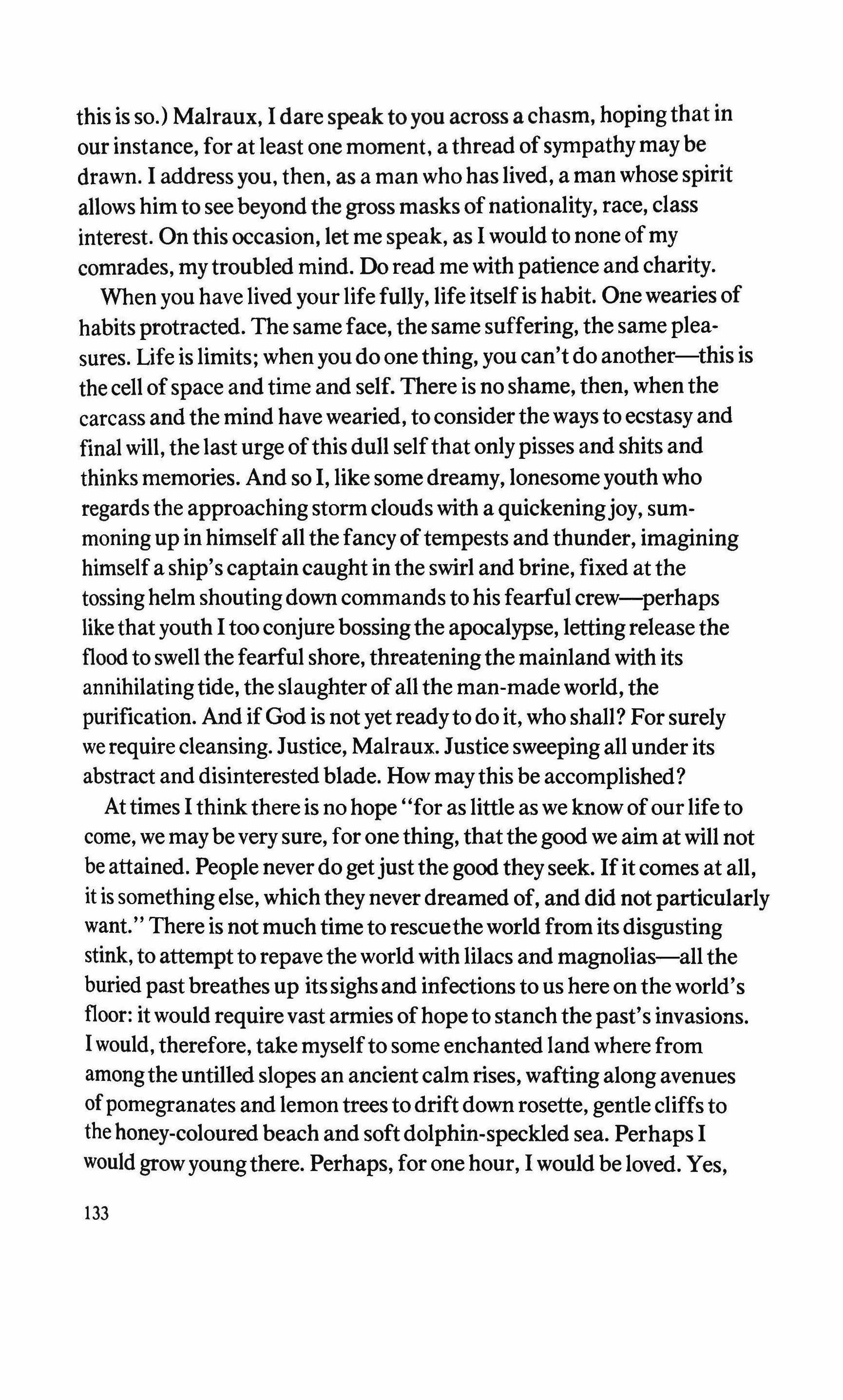
this is so.) Malraux, I dare speak to you across a chasm, hopingthat in our instance, for at least one moment, a thread ofsympathy may be drawn. I address you, then, as a man who has lived, a man whose spirit allows him to see beyond the gross masks of nationality, race, class interest. On this occasion, let me speak, as I would to none ofmy comrades, my troubled mind. Do read me with patience and charity. When you have lived your life fully, life itself is habit. One wearies of habits protracted. The same face, the same suffering, the same pleasures. Life is limits; when you do one thing, you can't do another-this is the cell ofspace and time and self. There is no shame, then, when the carcass and the mind have wearied, to considerthe ways to ecstasy and final will, the last urge ofthis dull selfthat onlypisses and shits and thinks memories. And so I, like some dreamy, lonesome youth who regards the approaching storm clouds with a quickeningjoy, summoning up in himselfall thefancy oftempests and thunder, imagining himself a ship'scaptaincaught in the swirl and brine, fixed at the tossinghelm shoutingdown commands to his fearful crew-perhaps likethat youth I too conjurebossingthe apocalypse, letting release the flood to swellthefearful shore, threateningthe mainland with its annihilatingtide, the slaughter of all the man-made world, the purification. And if God is not yetreadyto do it, who shall? For surely we requirecleansing. Justice, Malraux. Justice sweeping all under its abstract and disinterested blade. How maythis be accomplished? Attimes I think there is no hope "for as little as we knowof our life to come, we may bevery sure, for one thing, thatthe good we aim at will not be attained. People never do getjust the goodthey seek. Ifit comes at all, it is somethingelse, which they never dreamed of, and did not particularly want." There is not much time to rescuethe world from itsdisgusting stink, to attempt to repavethe world with lilacs and magnolias-allthe buried past breathes up itssighs and infections to us here on the world's floor: it would require vast armies ofhope to stanch the past's invasions. I would, therefore, take myselfto some enchanted land where from amongthe untilled slopes an ancient calm rises, waftingalong avenues ofpomegranates and lemon trees to drift down rosette, gentle cliffs to thehoney-coloured beach and softdolphin-speckled sea. Perhaps I would growyoungthere. Perhaps, for one hour, I would be loved. Yes,
133
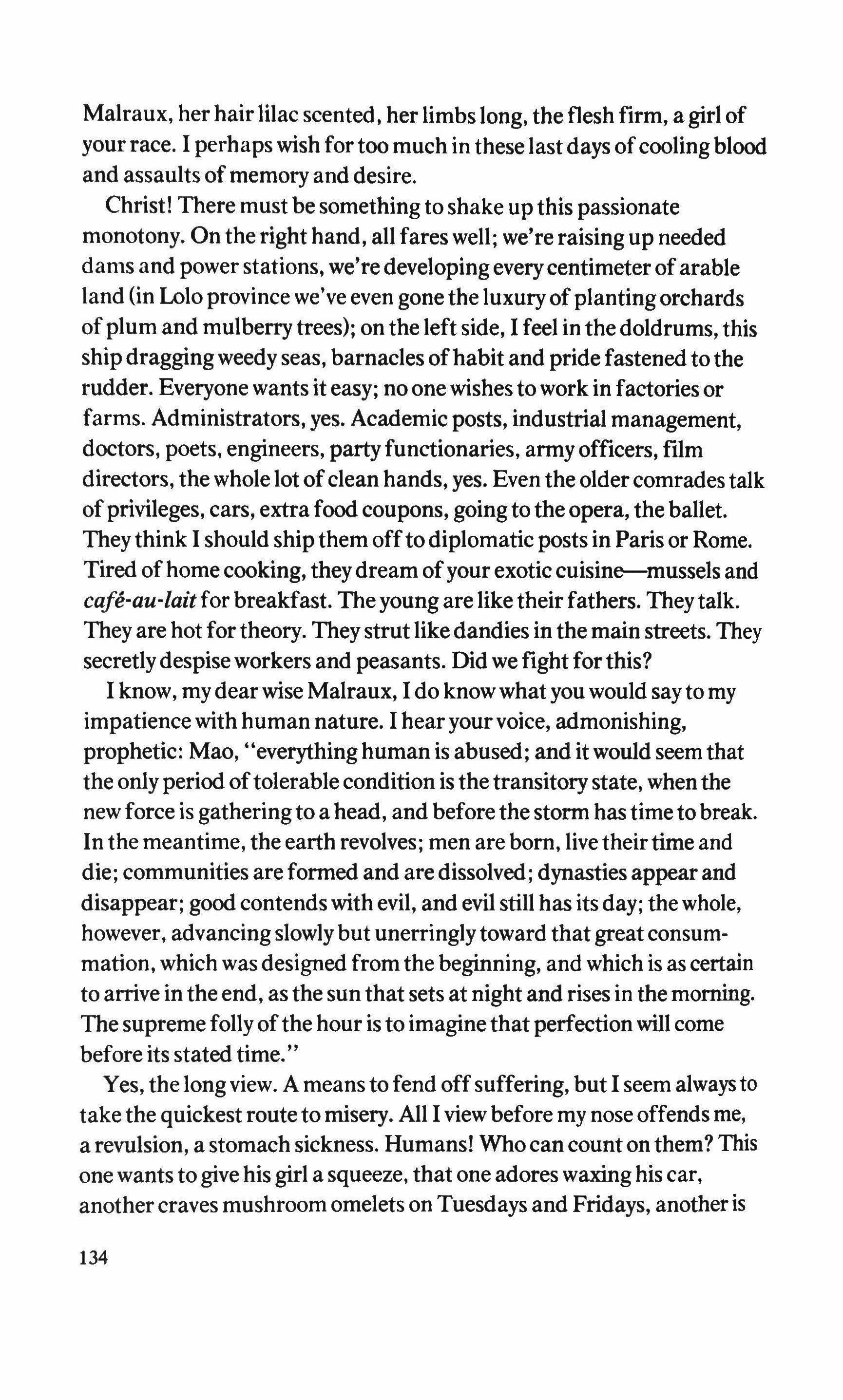
Malraux, her hair lilac scented, her limbs long, the flesh firm, a girl of your race. I perhaps wish for too much in these last days ofcoolingblood and assaults ofmemory and desire.
Christ! There must be something to shake up this passionate monotony. On the right hand, all fares well; we're raising up needed dams and power stations, we're developing everycentimeter ofarable land (in l..olo province we've even gone the luxury ofplantingorchards ofplum and mulberrytrees); on the left side, I feel in thedoldrums, this shipdraggingweedy seas, barnacles ofhabit and pride fastened to the rudder. Everyone wants it easy; no one wishes to work in factories or farms. Administrators, yes. Academic posts, industrial management, doctors, poets, engineers, partyfunctionaries, armyofficers, film directors, the whole lot ofclean hands, yes. Even the older comrades talk ofprivileges, cars, extra food coupons, goingto the opera, the ballet. Theythink I should ship them offto diplomatic posts in Paris or Rome. Tired ofhome cooking, theydream ofyour exotic cuisine-mussels and cafe-au-laitfor breakfast. Theyoung are like their fathers. Theytalk. They are hot for theory. They strut like dandies in the main streets. They secretlydespiseworkers and peasants. Did we fight forthis?
I know, mydear wise Malraux, I do knowwhat you would say to my impatience with human nature. I hear your voice, admonishing, prophetic: Mao, "everything human is abused; and itwould seem that the onlyperiod oftolerable condition is the transitory state, whenthe new force is gatheringto a head, and before the storm has time to break. In the meantime, the earth revolves; men are born, live theirtime and die; communities are formed and are dissolved; dynasties appear and disappear; good contends with evil, and evil still has its day; the whole, however, advancingslowly but unerringlytoward that great consummation, which was designed from the beginning, and which is as certain to arrive in the end, as the sun that sets at night and rises in the morning. The supreme follyofthe hour is to imaginethat perfection will come before its stated time."
Yes, the long view. A means to fend offsuffering, but I seem always to take the quickest route to misery. All I view before my nose offends me, a revulsion, a stomach sickness. Humans! Who can count on them? This one wants to give his girl a squeeze, that one adores waxing his car, another craves mushroom omelets on Tuesdays and Fridays, anotheris
134
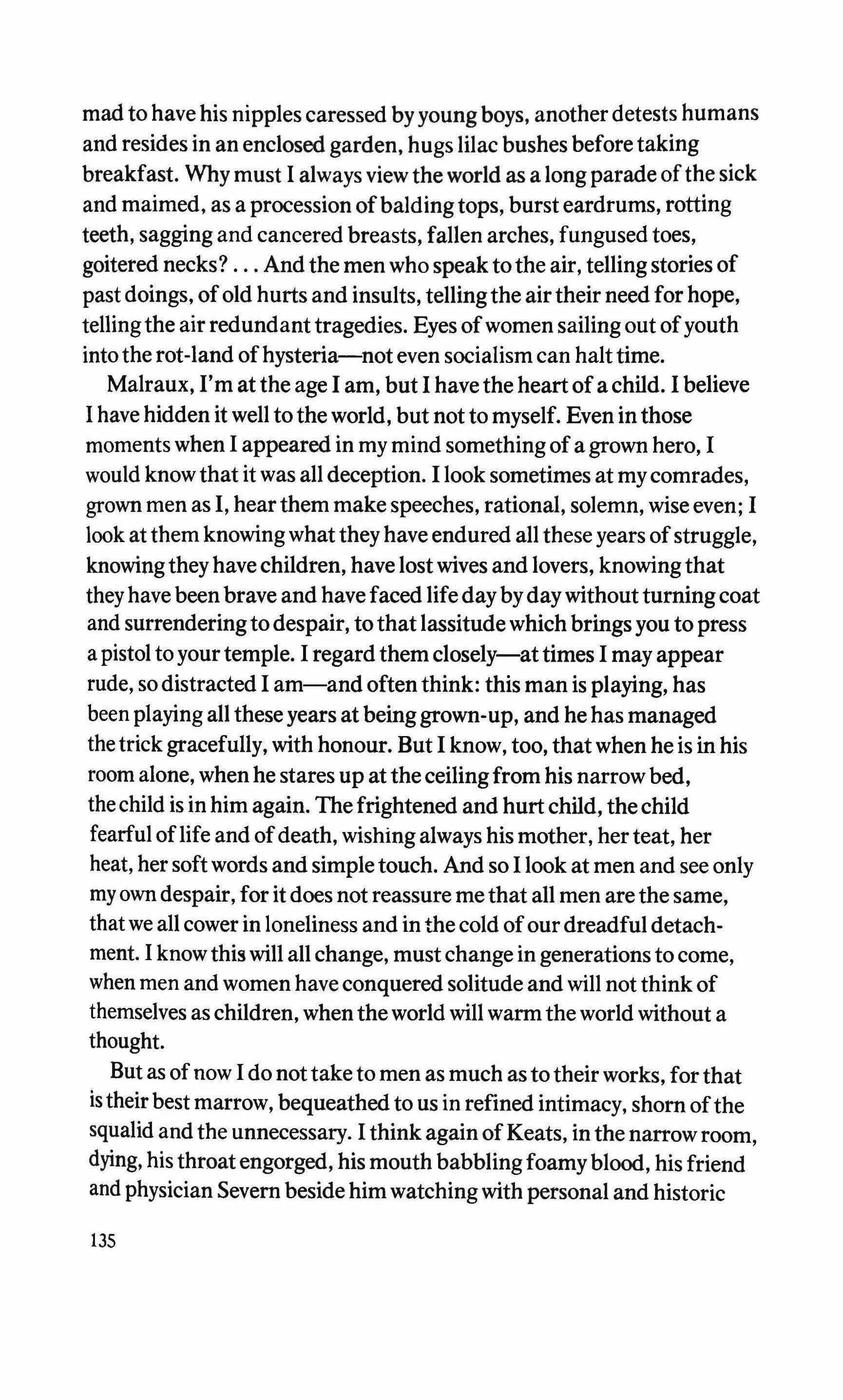
mad to have his nipples caressed by young boys, another detests humans and resides in an enclosed garden, hugs lilac bushes before taking breakfast. Why must I always view the world as a longparade ofthe sick and maimed, as a procession ofbaldingtops, burst eardrums, rotting teeth, sagging and cancered breasts, fallen arches, fungused toes, goitered necks? And the men who speak to the air, tellingstories of pastdoings, ofold hurts and insults, tellingthe airtheir need for hope, tellingthe air redundant tragedies. Eyes of women sailing out ofyouth intothe rot-land ofhysteria-not even socialism can halt time.
Malraux, I'm at the age I am, but I have the heart of a child. I believe I have hidden it well to the world, but not to myself. Even inthose moments when I appeared in my mind something of a grown hero, I would knowthat it was all deception. I look sometimes at mycomrades, grown men as I, hear them make speeches, rational, solemn, wise even; I look at them knowingwhatthey have endured all these years ofstruggle, knowingtheyhave children, have lostwives and lovers, knowing that they have been brave and have faced life daybydaywithoutturning coat and surrenderingto despair, to that lassitudewhich brings you to press a pistol to your temple. I regard them closely-at times I may appear rude, so distracted I am-and often think: this man is playing, has been playing all theseyears at beinggrown-up, and he has managed the trick gracefully, with honour. But I know, too, that when he is in his room alone, whenhe stares up at theceilingfrom his narrow bed, the child is in him again. The frightened and hurt child, thechild fearful oflife and ofdeath, wishingalways his mother, her teat, her heat, her soft words and simple touch. And so I look at men and see only my own despair, for it does not reassure me that all men are the same, that we all cower in loneliness and in the cold of our dreadful detachment. I know this will all change, must change in generations to come, when men and women haveconquered solitude and will not think of themselves as children, when theworld will warm the world without a thought.
But as of now I do not take to men as much as to their works, forthat is theirbest marrow, bequeathed to us in refined intimacy, shorn ofthe squalid and the unnecessary. I think again of Keats, in the narrow room, dying, his throat engorged, his mouth babblingfoamyblood, his friend and physician Severn beside himwatching with personal and historic
135
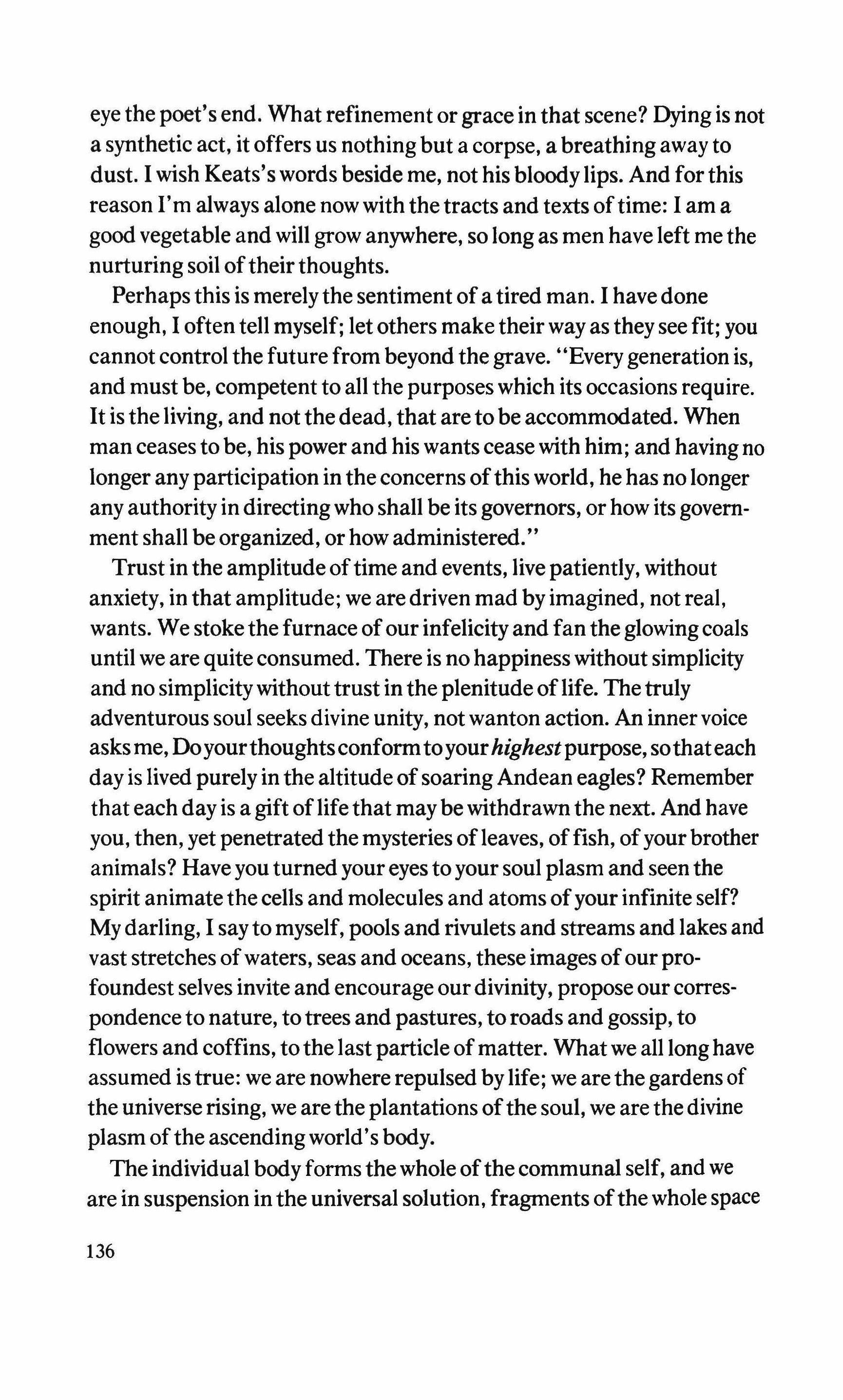
eye the poet's end. What refinement or grace in that scene? Dying is not a synthetic act, it offers us nothing but a corpse, a breathing away to dust. I wish Keats's words beside me, not his bloodylips. And for this reason I'm always alone now with the tracts and texts oftime: I am a goodvegetable and will grow anywhere, so long as men have left me the nurturing soil oftheirthoughts.
Perhaps this is merelythe sentiment of a tired man. I have done enough, I often tell myself; letothers make their way as they see fit; you cannot control the future from beyond the grave. "Everygeneration is, and must be, competent to all the purposes which its occasions require. It is the living, and not thedead, that are to be accommodated. When man ceases to be, his power and his wants cease with him; and having no longer any participation in the concerns ofthis world, he has no longer any authority in directing who shall be its governors, or how its government shall be organized, or how administered."
Trust in the amplitude oftime and events, live patiently, without anxiety, in that amplitude; we are driven mad byimagined, not real, wants. We stokethe furnace of our infelicity and fan the glowing coals until we are quite consumed. There is no happiness without simplicity and no simplicitywithout trust in the plenitude oflife. The truly adventurous soul seeks divine unity, not wanton action. An innervoice asks me, Doyourthoughtsconformtoyourhighestpurpose, sothateach day is lived purely in the altitude ofsoaringAndean eagles? Remember that each dayis a gift oflife that maybe withdrawn the next. And have you, then, yet penetrated the mysteries ofleaves, offish, ofyour brother animals? Have you turned youreyes to your soul plasm and seen the spirit animate the cells and molecules and atoms ofyour infinite self? Mydarling, I say to myself, pools and rivulets and streams and lakes and vast stretches ofwaters, seas and oceans, these images of our profoundest selves invite and encourage our divinity, propose our correspondence to nature, to trees and pastures, to roads and gossip, to flowers and coffins, tothe last particle of matter. What we all long have assumed is true: we are nowhere repulsedbylife; we are the gardens of the universe rising, we are the plantations ofthe soul, we are the divine plasm ofthe ascendingworld's body.
The individual body forms the whole ofthe communal self, and we are in suspension in the universal solution, fragments ofthe whole space
136
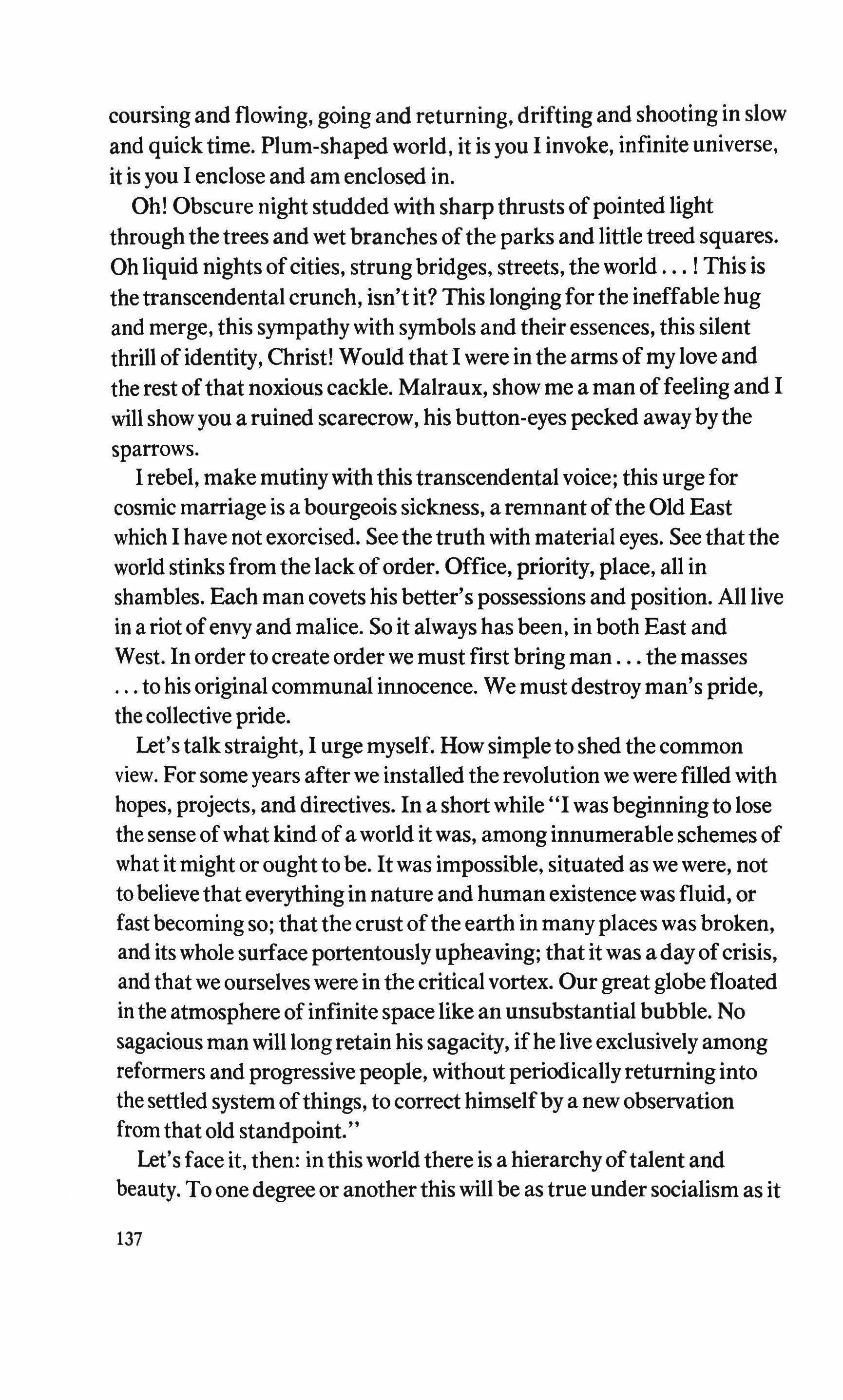
coursing and flowing, going and returning, drifting and shooting in slow and quick time. Plum-shaped world, it is you I invoke, infinite universe, it is you I enclose and am enclosed in.
Oh! Obscure night studded with sharp thrusts ofpointedlight through the trees and wet branches ofthe parks and little treed squares. Oh liquid nights ofcities, strungbridges, streets, the world ! This is thetranscendental crunch, isn't it? This longingforthe ineffable hug and merge, this sympathywith symbols and their essences, this silent thrill ofidentity, Christ! Would thatI were in the arms ofmy love and the rest ofthat noxious cackle. Malraux, show me a man offeeling and I will showyou a ruined scarecrow, his button-eyes pecked away bythe sparrows.
I rebel, make mutinywith this transcendental voice; this urge for cosmic marriage is a bourgeois sickness, a remnant ofthe Old East which I have not exorcised. Seethe truth with material eyes. See that the world stinks fromthe lack oforder. Office, priority, place, all in shambles. Each man covets his better's possessions and position. All live in a riot ofenvy and malice. So it always has been, in both East and West. In order to create order we must first bring man the masses to his original communal innocence. We must destroyman's pride, thecollective pride.
Let'stalk straight, I urge myself. Howsimple to shed the common view. For some years after we installed the revolution we were filled with hopes, projects, and directives. In a short while "I was beginning to lose the sense ofwhat kind of a world it was, among innumerable schemes of what it might or ought to be. It was impossible, situated as we were, not to believe thateverything in nature and human existence was fluid, or fast becoming so; thatthe crust ofthe earth in many places was broken, and itswhole surface portentouslyupheaving; that it was a dayofcrisis, and that we ourselves were inthe critical vortex. Our greatglobe floated inthe atmosphere ofinfinite space like an unsubstantial bubble. No sagacious man will longretain his sagacity, ifhe live exclusively among reformers and progressivepeople, without periodicallyreturning into the settled system ofthings, to correct himselfby a new observation from that old standpoint."
Let's face it, then: in thisworld there is a hierarchyoftalent and beauty. To one degree or another this will be as true under socialism as it
137
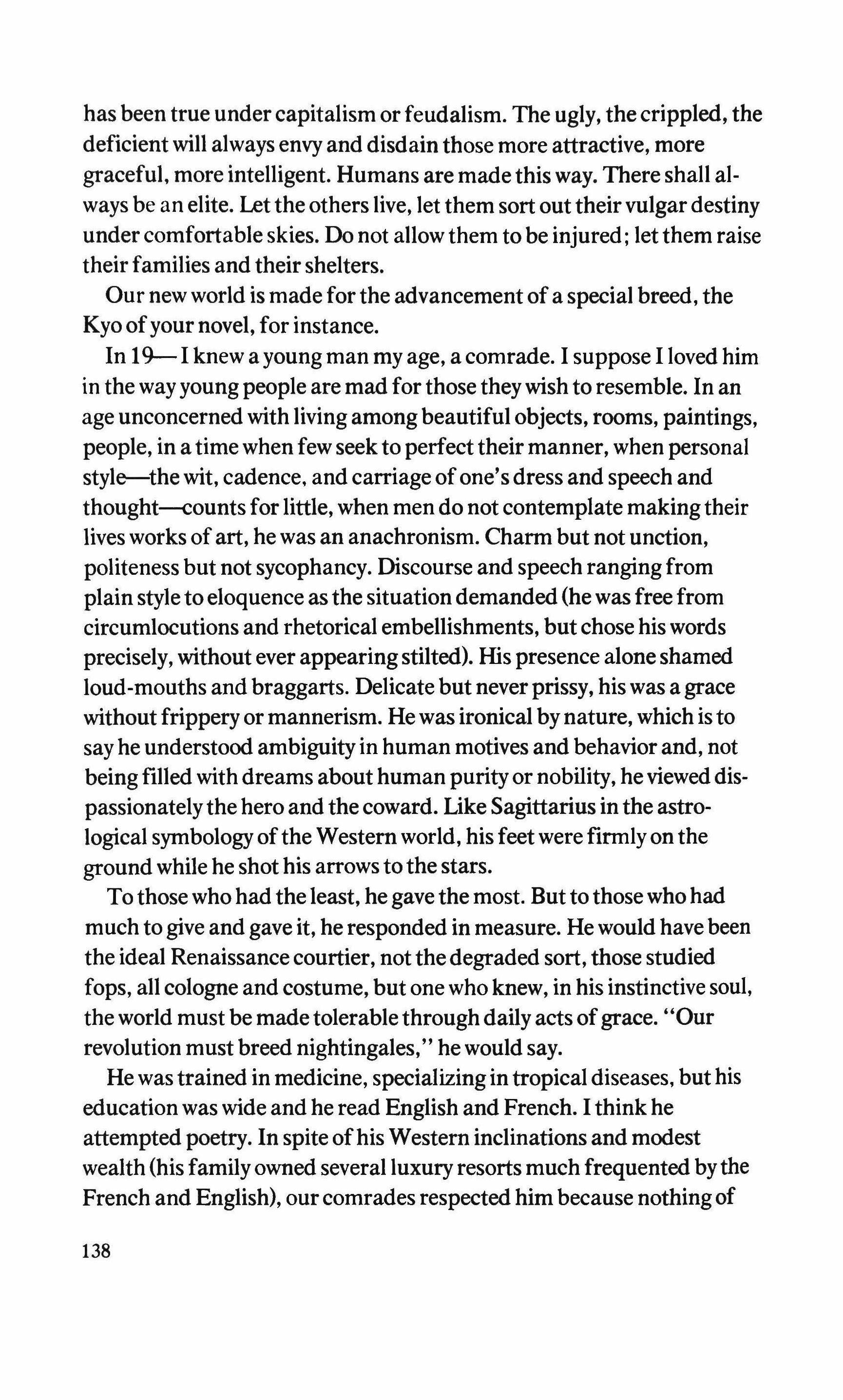
has been true under capitalism or feudalism. The ugly, the crippled, the deficient will always envy and disdain those more attractive, more graceful, more intelligent. Humans are made this way. There shall always be an elite. Let the others live, let them sort out theirvulgardestiny under comfortable skies. Do not allow them to be injured; let them raise their families and their shelters.
Our new world is made forthe advancement of a special breed, the Kyo ofyour novel, for instance.
In 19- I knew a young man my age, a comrade. I suppose I loved him in the wayyoung people are mad for those theywish to resemble. In an age unconcerned with living amongbeautiful objects, rooms, paintings, people, in a time when few seek to perfect their manner, when personal style-the wit, cadence, and carriage ofone's dress and speech and thought=-counts for little, when men do not contemplatemakingtheir lives works of art, he was an anachronism. Charm but not unction, politeness but not sycophancy. Discourse and speechranging from plainstyle to eloquence as the situation demanded (he was free from circumlocutions and rhetorical embellishments, but chose his words precisely, without ever appearingstilted). His presence alone shamed loud - mouths and braggarts. Delicate but never prissy, his was a grace without frippery or mannerism. He was ironical by nature, which is to say he understood ambiguity in human motives and behavior and, not being filled with dreams about human purity or nobility, he viewed dispassionatelythe hero and the coward. Like Sagittarius in the astrological symbology ofthe Western world, his feet were firmly on the ground while he shot his arrows to the stars.
To those who had the least, he gave the most. But to thosewho had much to give and gave it, he responded in measure. He would have been the ideal Renaissance courtier, not thedegraded sort, those studied fops, all cologne and costume, but one who knew, in his instinctive soul, the world must be made tolerable throughdaily acts ofgrace. "Our revolution must breed nightingales," he would say.
He was trained in medicine, specializing in tropical diseases, but his education was wide and he read English and French. I think he attempted poetry. In spite ofhis Western inclinations and modest wealth (his family owned several luxury resorts much frequentedbythe French and English), our comrades respected him because nothingof
138
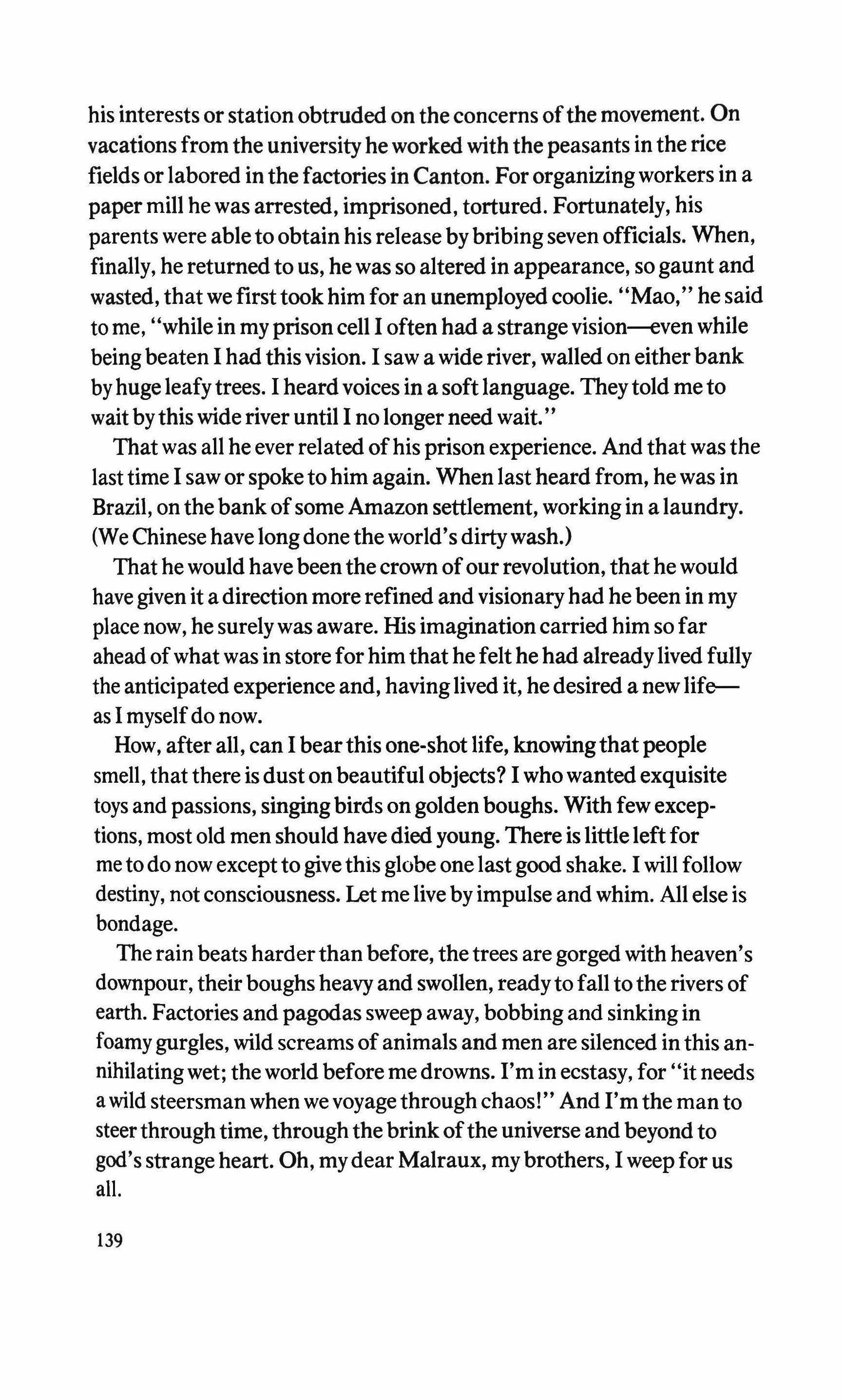
his interests or station obtruded on the concerns ofthe movement. On vacations from the universityheworked with the peasants inthe rice fields or labored in the factories in Canton. For organizingworkers in a paper mill he was arrested, imprisoned, tortured. Fortunately, his parents were able to obtain his release bybribing seven officials. When, finally, he returned to us, he was so altered in appearance, so gaunt and wasted, that we firsttook him for an unemployed coolie. "Mao," he said to me, "while in my prisoncell I often had a strange vision--even while beingbeaten I had thisvision. I saw a wide river, walled on eitherbank byhugeleafy trees. I heardvoices in a soft language. Theytold me to wait bythis wide river until I no longer need wait."
That was all he ever related ofhis prisonexperience. And that was the last time I saw or spoke to him again. When last heard from, he was in Brazil, on thebank of some Amazon settlement, working in a laundry. (We Chinese have long done the world's dirtywash.)
That he would have beenthe crown of our revolution, that he would have given it a direction more refined and visionaryhad he been in my place now, he surely was aware. His imagination carried him so far ahead ofwhat was in store for himthat hefelt hehad alreadylived fully the anticipatedexperience and, havinglived it, he desired a new lifeas I myselfdo now.
How, after all, can I bearthis one-shot life, knowingthat people smell, that there is dust on beautiful objects? I who wanted exquisite toys and passions, singingbirds on goldenboughs. With few exceptions, most old men should have died young. There is little left for me to do now except to givethis globe one last good shake. I will follow destiny, not consciousness. Let me live byimpulse and whim. All else is bondage.
The rain beats harderthan before, the trees are gorged with heaven's downpour, their boughsheavy and swollen, readyto fall to the rivers of earth. Factories and pagodas sweep away, bobbing and sinkingin foamygurgles, wild screams of animals and men are silenced in this annihilatingwet; the world before me drowns. I'm in ecstasy, for "it needs a wild steersman when we voyage through chaos!" And I'm the man to steerthroughtime, through the brink ofthe universe and beyond to god's strange heart. Oh, mydear Malraux, mybrothers, I weep for us all.
139
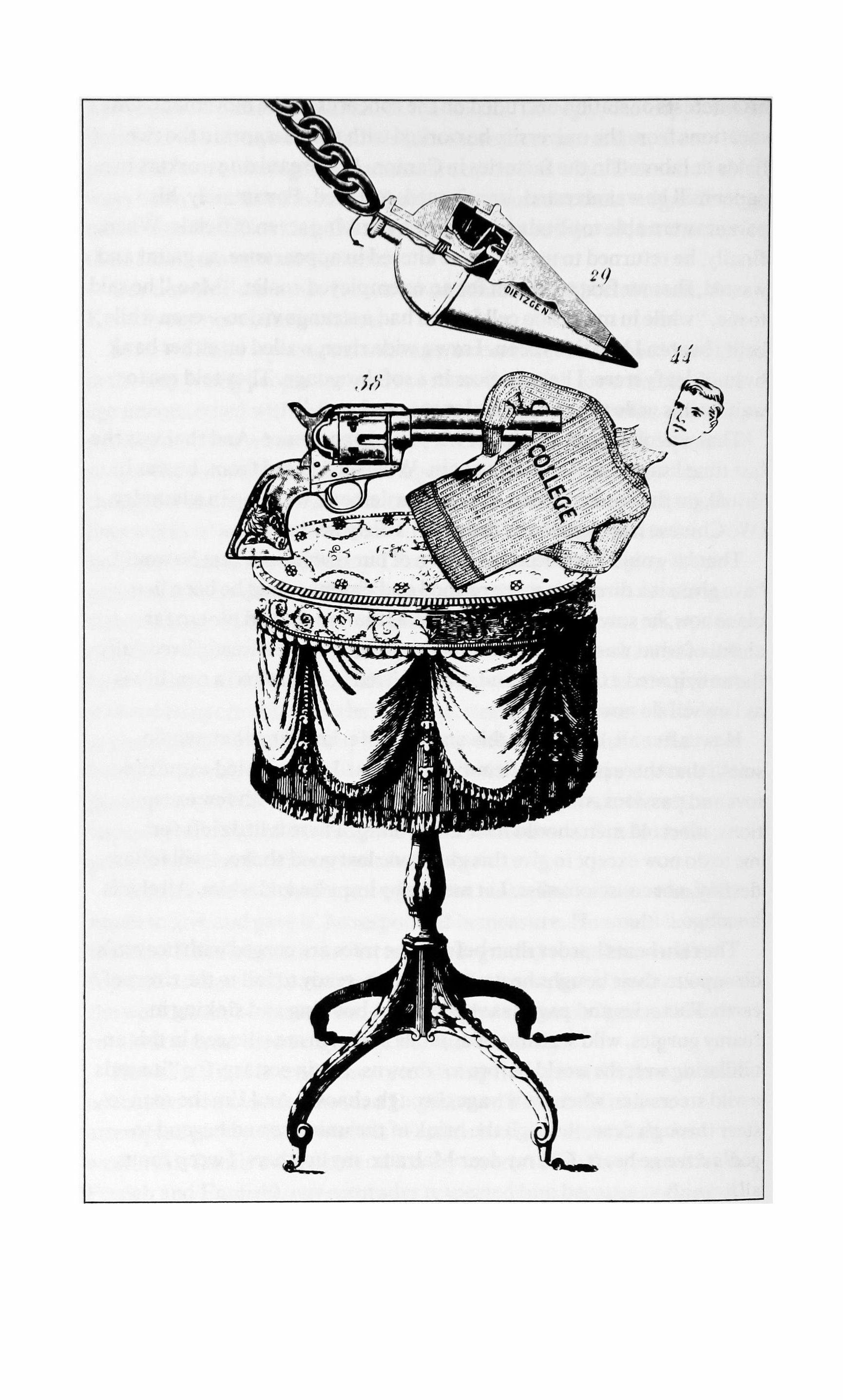
The Red Menace
Michael Anania
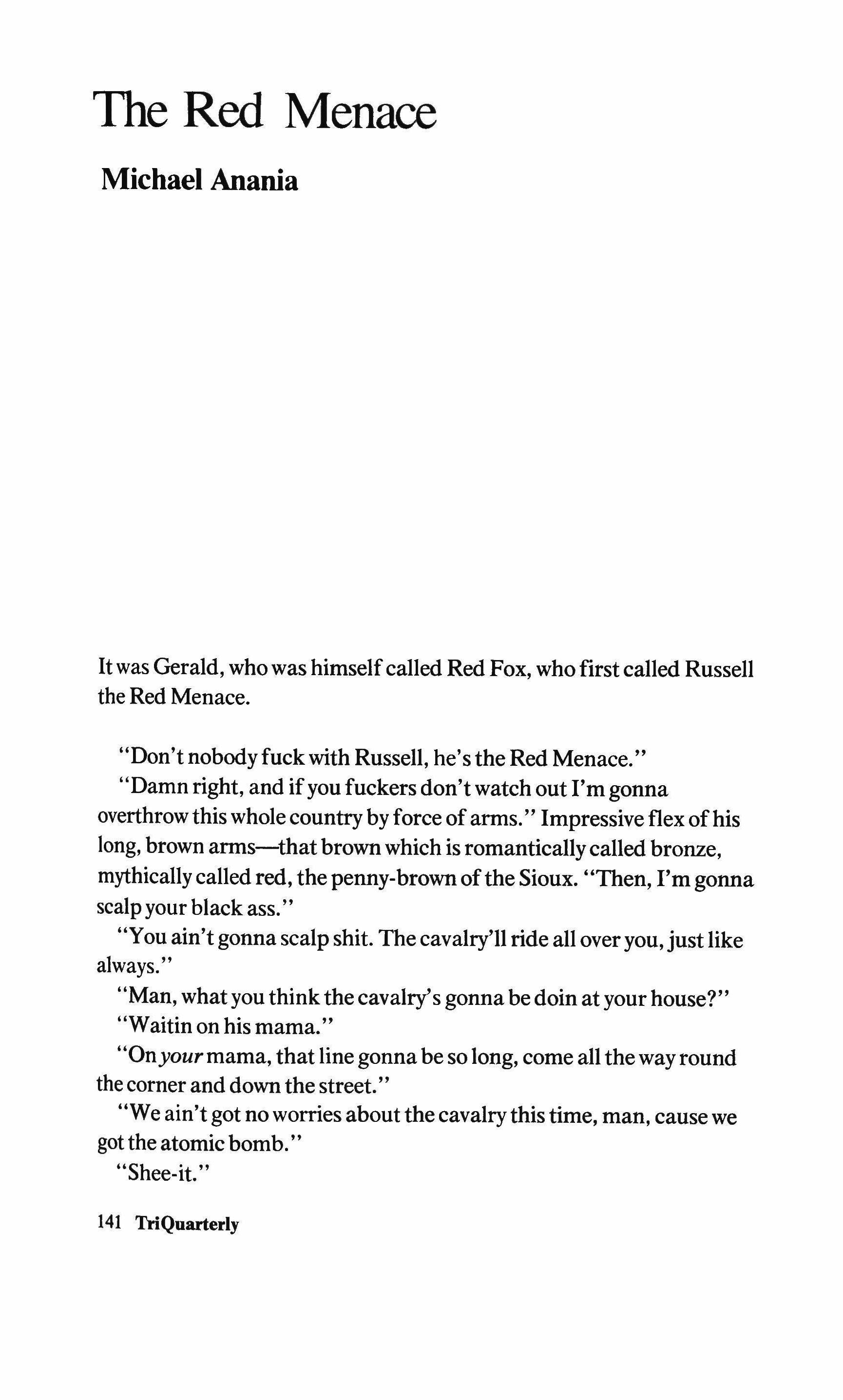
It was Gerald, who was himselfcalled Red Fox, whofirst called Russell the Red Menace.
"Don't nobody fuckwith Russell, he's the Red Menace."
"Damn right, and ifyou fuckers don't watch out I'm gonna overthrowthis whole countryby force of arms." Impressiveflex ofhis long, brown arms-that brown which is romanticallycalled bronze, mythically called red, the penny-brown ofthe Sioux. "Then, I'm gonna scalp your black ass."
"You ain't gonna scalp shit. The cavalry'll ride all over you, just like always."
"Man, whatyou think the cavalry's gonna be doin at your house?"
"Waitin on his mama."
"Onyour mama, that line gonna be so long, come all the way round the corner and down the street."
"We ain't got no worries about the cavalry this time, man, cause we got the atomic bomb."
"Shee-it, "
141 TriQuarterly
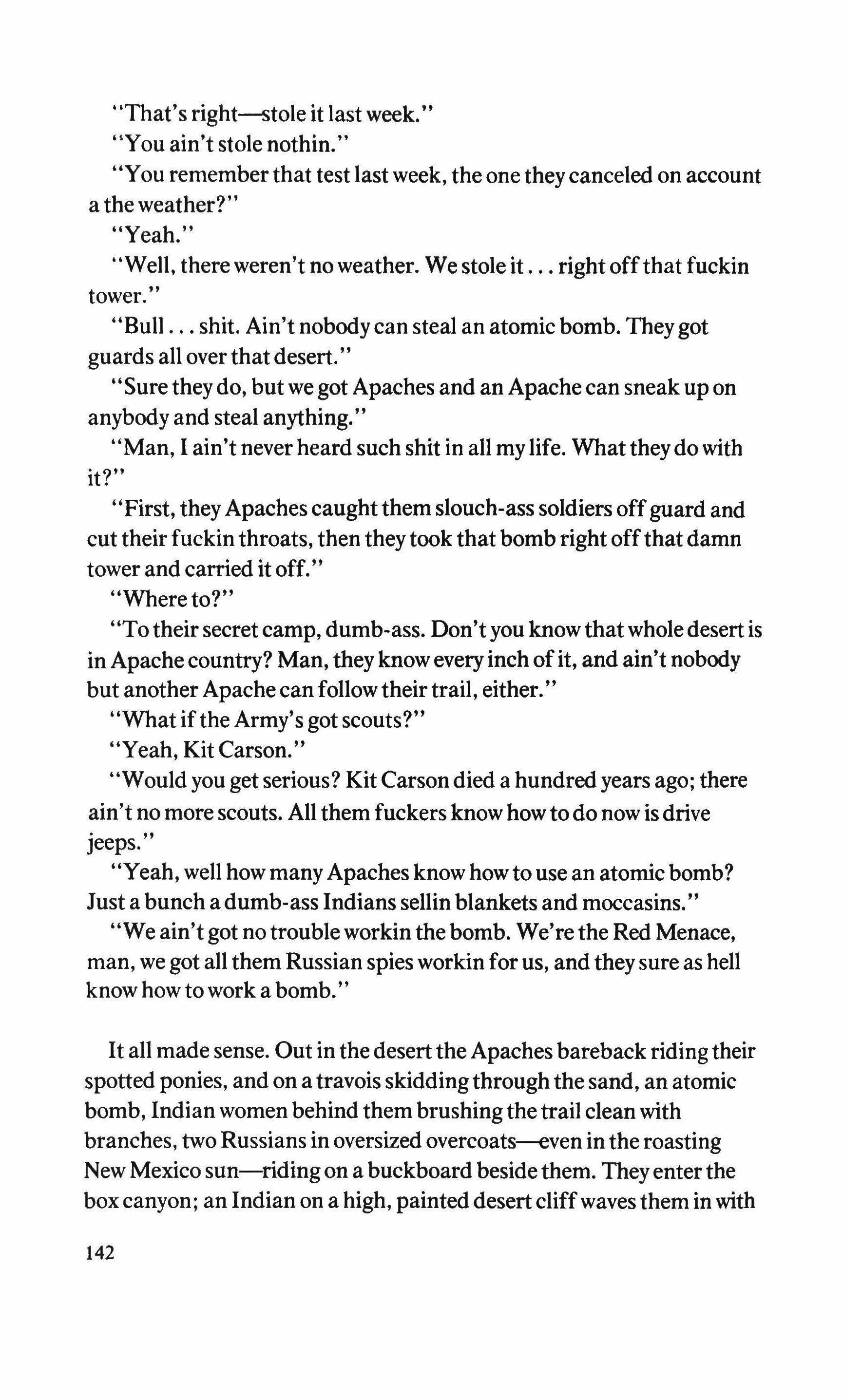
"That's right-stole it last week."
"You ain't stole nothin."
"You remember that test last week, the one theycanceled on account a the weather?"
"Yeah."
"Well, thereweren't no weather. We stole it right offthat fuckin tower."
"Bull shit. Ain't nobody can steal an atomic bomb. Theygot guards all over that desert. "
"Sure theydo, but we got Apaches and an Apache can sneak up on anybody and steal anything."
"Man, I ain't never heard such shit in all my life. What theydo with it?"
"First, theyApachescaughtthem slouch-ass soldiers offguard and cut their fuckin throats, then theytook that bomb right offthat damn tower and carried it off."
"Where to?"
"Totheir secret camp, dumb-ass. Don't you knowthat whole desert is in Apachecountry? Man, they know every inch ofit, and ain't nobody but another Apache can followtheirtrail, either."
"What ifthe Army's got scouts?" Yeah, Kit Carson."
"Would you get serious? Kit Carson died a hundred years ago; there ain't no more scouts. All them fuckers know how to do now is drive jeeps."
"Yeah, well how many Apaches know how to use an atomic bomb? Just a bunch a dumb-ass Indians sellin blankets and moccasins."
"We ain't got no troubleworkin the bomb. We're the Red Menace, man, we got all them Russian spies workin for us, and they sure as hell know how to work a bomb."
It all made sense. Out in the desert the Apaches bareback ridingtheir spotted ponies, and on a travois skiddingthrough the sand, an atomic bomb, Indian women behind them brushing thetrail clean with branches, two Russians in oversized overcoats--even inthe roasting New Mexico sun-riding on a buckboard besidethem. They enter the box canyon; an Indian on a high, painted desertcliff waves them in with
142
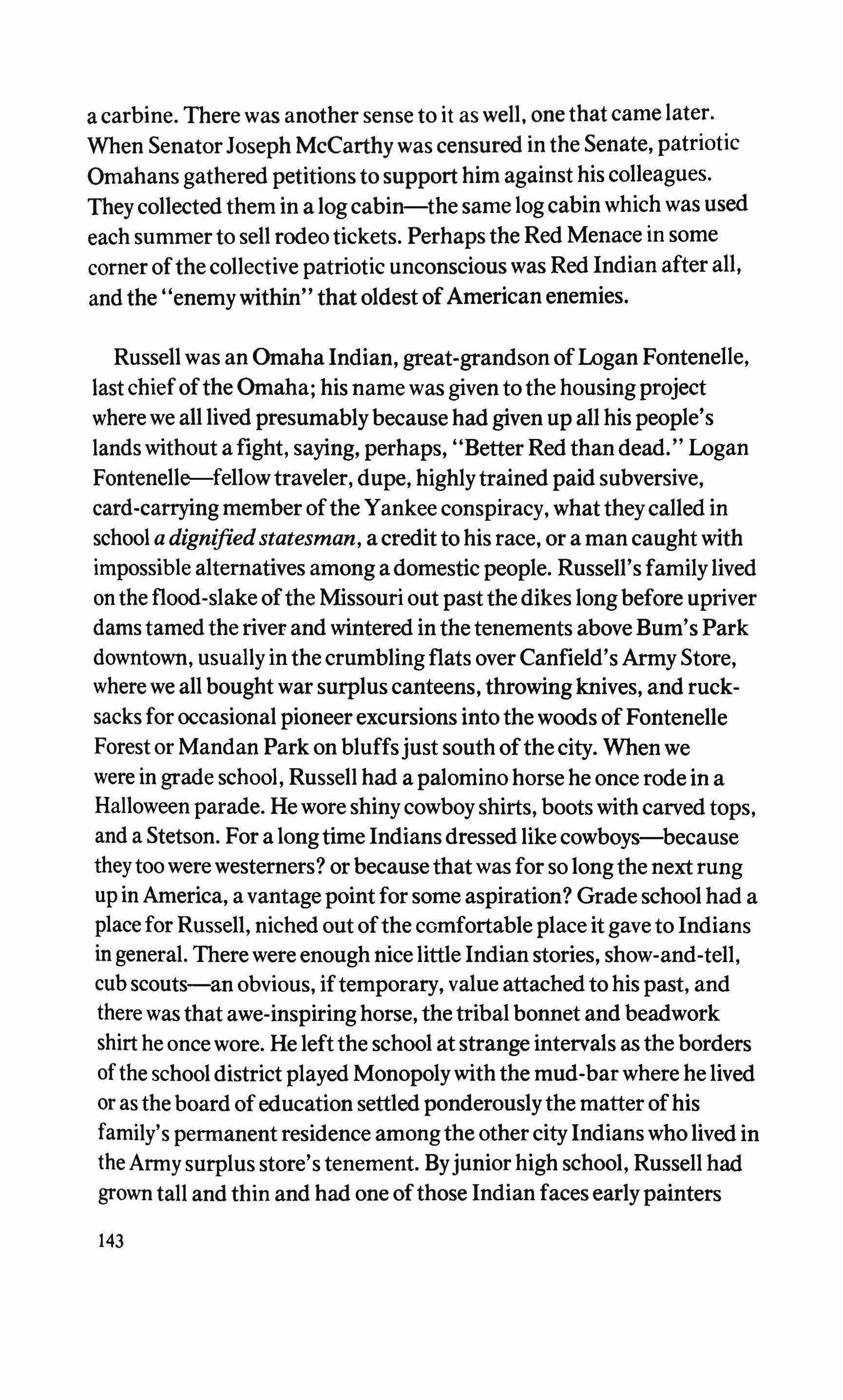
a carbine. There was another sense to it as well. one that came later. When SenatorJoseph McCarthy was censured in the Senate, patriotic Omahans gathered petitions to support him against his colleagues. Theycollected them in a logcabin-the same logcabin which was used each summer to sell rodeotickets. Perhaps the Red Menace in some corner ofthe collective patriotic unconscious was Red Indian after all, and the "enemywithin" that oldest ofAmerican enemies.
Russell was an Omaha Indian, great-grandson ofLogan Fontenelle, last chiefofthe Omaha; his name was given to the housingproject where we all lived presumablybecause had given up all his people's lands without a fight, saying, perhaps, "Better Red thandead." Logan Fontenelle-fellowtraveler, dupe, highlytrained paid subversive, card-carrying member ofthe Yankee conspiracy, whattheycalled in school a dignifiedstatesman, a credit to his race, or a man caught with impossible alternatives among a domestic people. Russell's familylived on the flood-slake ofthe Missouri out past the dikes longbefore upriver damstamed the river and wintered in the tenements above Bum's Park downtown, usually in the crumbling flats over Canfield's ArmyStore, where we all bought war surplus canteens, throwingknives, and rucksacks for occasional pioneerexcursions into thewoods ofFontenelle Forest or Mandan Park on bluffsjust south ofthecity. When we were in grade school, Russell had a palomino horse he once rode in a Halloween parade. He wore shinycowboyshirts, boots with carved tops, and a Stetson. For a longtime Indians dressed like cowboys-because they too were westerners? or because that was for so longthe next rung up in America, a vantage point for some aspiration? Grade school had a place for Russell, niched out ofthe comfortable place it gave to Indians in general. There were enough nice little Indian stories, show-and-tell, cub scouts-an obvious, iftemporary, value attached to his past, and there was that awe-inspiringhorse, thetribal bonnet and beadwork shirt he once wore. He leftthe school at strange intervals as the borders ofthe school district played Monopolywith the mud-barwhere he lived or as the board ofeducation settled ponderouslythe matter ofhis family's permanent residence amongthe other city Indians who lived in theArmysurplus store's tenement. Byjuniorhigh school, Russell had grown tall and thin and had one ofthose Indian faces earlypainters
143
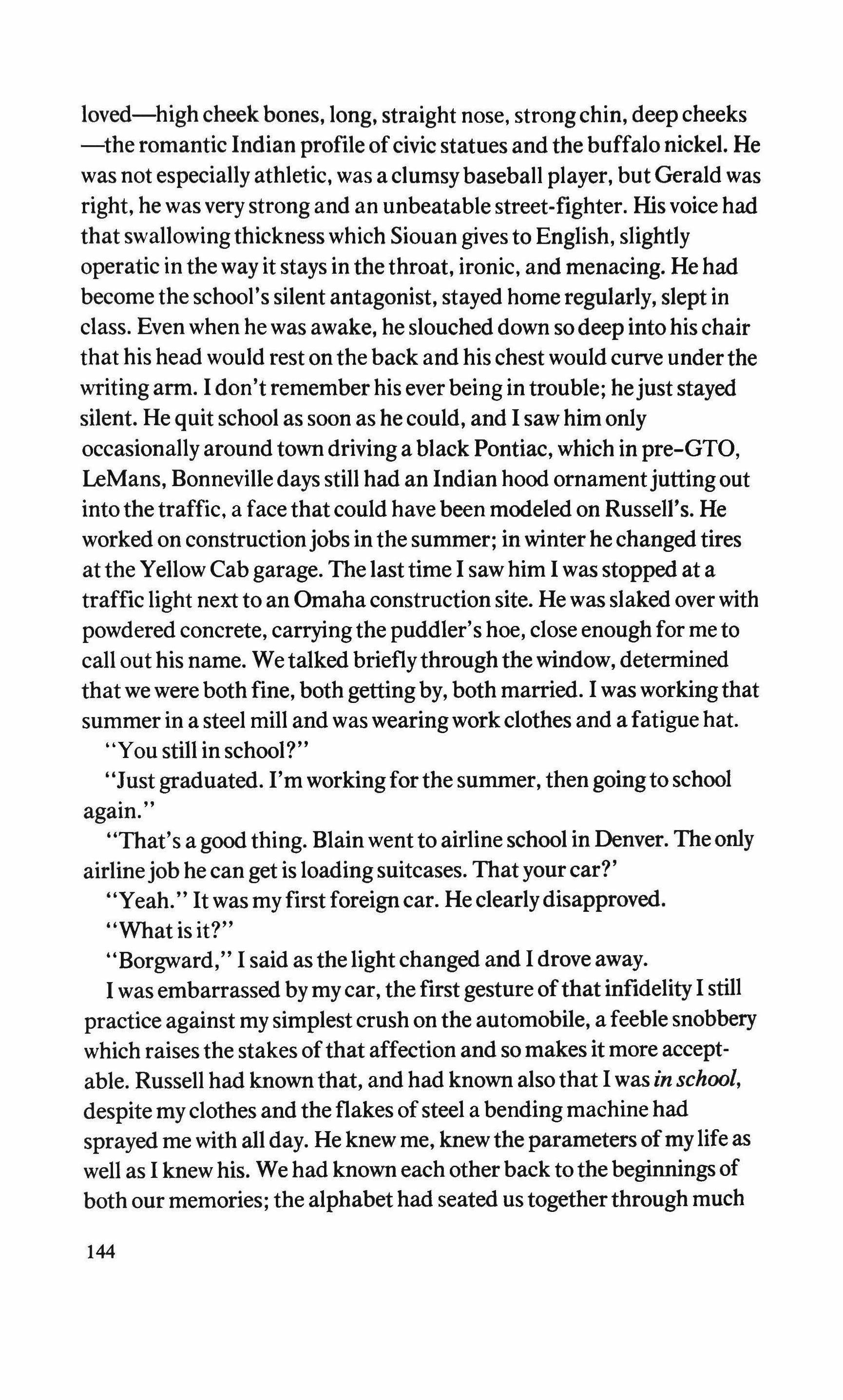
loved-high cheek bones, long, straight nose, strongchin, deep cheeks -the romantic Indian profile ofcivic statues and the buffalo nickel. He was not especially athletic, was a clumsy baseball player, but Gerald was right, he was very strong and an unbeatable street-fighter. His voice had that swallowingthickness which Siouan gives to English, slightly operatic in the way it stays in the throat, ironic, and menacing. He had become the school's silent antagonist, stayed home regularly, slept in class. Even when he was awake, he slouched down so deep into his chair that his head would rest on the back and his chest would curve underthe writing arm. I don't remember his ever being in trouble; hejuststayed silent. He quit school as soon as he could, and I saw him only occasionally around town driving a black Pontiac, which in pre-GTO, l..eMans, Bonneville days still had an Indian hood ornamentjutting out intothe traffic. a face that could have been modeled on Russell's. He worked on constructionjobs inthe summer; in winter he changed tires at the Yellow Cab garage. The lasttime I saw him I was stopped at a traffic light next to an Omaha construction site. He was slaked over with powdered concrete, carrying the puddler's hoe, close enough for me to call out his name. Wetalked brieflythroughthewindow, determined that we were both fine, both gettingby, both married. I was workingthat summer in a steel mill and was wearingwork clothes and a fatigue hat.
"You still in school?"
"Just graduated. I'm working forthe summer, then goingto school again."
"That's a goodthing. Blain went to airline school in Denver. The only airlinejob he can get is loading suitcases. That yourcar?'
"Yeah." It was my first foreign car. He clearlydisapproved.
"What is it?"
"Borgward," I said as the lightchanged and I drove away.
I was embarrassed by my car, the first gesture ofthat infidelity I still practiceagainst my simplest crush on the automobile, a feeble snobbery which raises the stakes ofthat affection and so makes it more acceptable. Russell had knownthat, and had known also that I was in school, despite my clothes and the flakes ofsteel a bending machine had sprayed me with all day. He knew me, knewthe parameters ofmy life as well as I knew his. We had known each other back to the beginnings of both our memories; the alphabet had seated us togetherthrough much
144
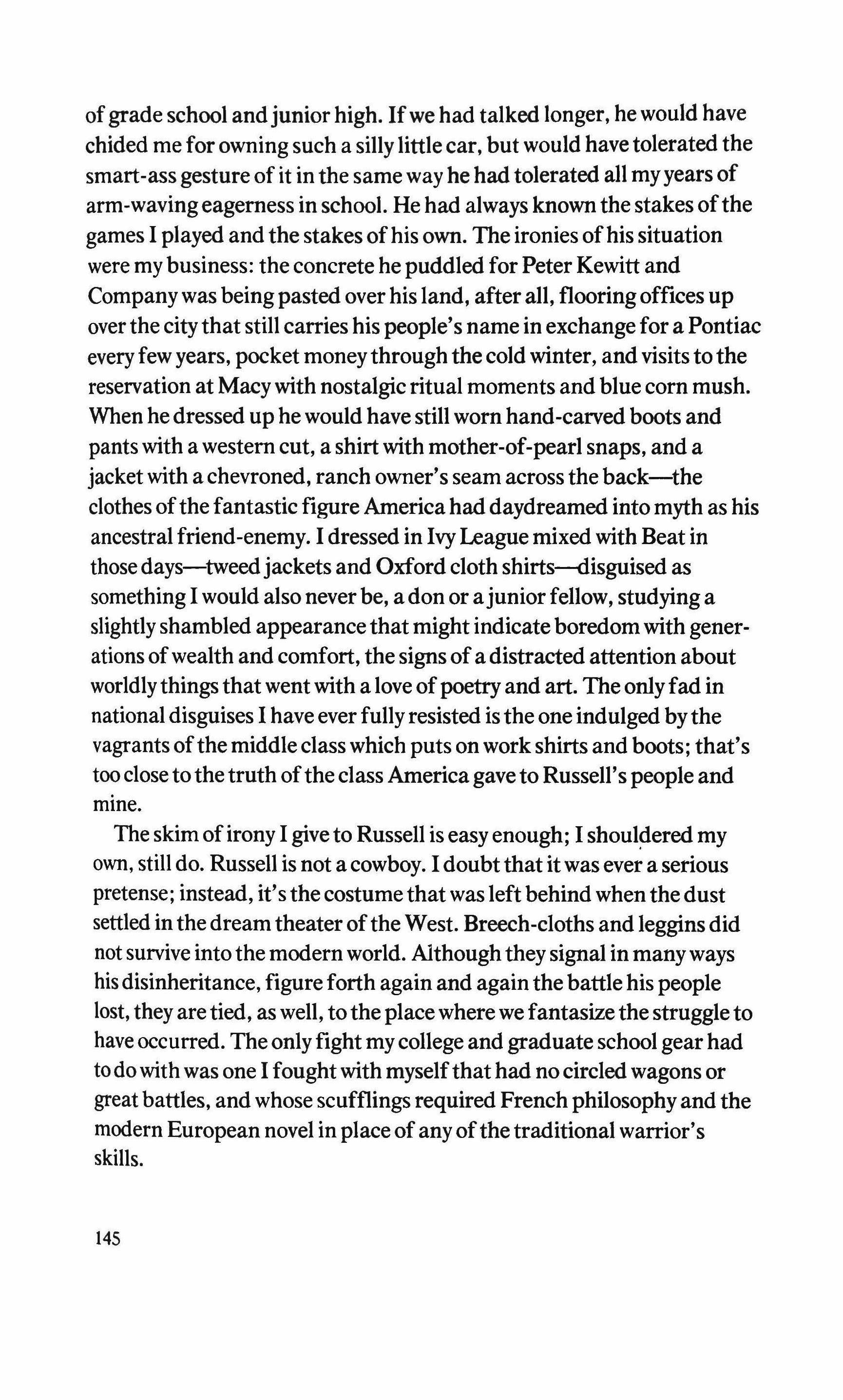
ofgrade school andjuniorhigh. If we had talked longer, he would have chided me for owning such a sillylittle car, but would have tolerated the smart-ass gesture of it in the same way he had tolerated all myyears of arm-wavingeagerness in school. He had always known the stakes ofthe games I played and the stakes ofhis own. The ironies ofhis situation were my business: the concrete he puddled for Peter Kewitt and Company was beingpasted over his land, afterall, flooringoffices up over the citythat still carries his people's name in exchange for a Pontiac every few years, pocket moneythrough the cold winter, and visits to the reservation at Macy with nostalgic ritual moments and blue corn mush. When hedressed up he would have still worn hand-carved boots and pants with a western cut, a shirt with mother-of-pearl snaps, and a jacket with a chevroned, ranch owner's seam across the back-the clothes ofthe fantastic figure America had daydreamed into myth as his ancestral friend-enemy. I dressed in IvyLeague mixed with Beat in thosedays-tweedjackets and Oxford cloth shirts-<iisguised as something I would also never be, adon or ajuniorfellow, studying a slightly shambled appearance that might indicate boredom with generations ofwealth and comfort, the signs of a distracted attention about worldlythings that went with a love ofpoetry and art. The onlyfad in national disguises I have ever fullyresisted isthe one indulgedbythe vagrants ofthe middle class which puts on work shirts and boots; that's too close to the truth ofthe class Americagave to Russell's people and mine.
The skim ofirony I give to Russell is easy enough; I shouldered my own, still do. Russell is not a cowboy. I doubtthat it was ever a serious pretense; instead, it's the costume that was leftbehind when the dust settled in the dream theater ofthe West. Breech-cloths and leggins did not survive into the modern world. Althoughtheysignal in manyways hisdisinheritance, figure forth again and again thebattle his people lost, they are tied, as well, to the place where we fantasize the struggle to have occurred. The onlyfight my college and graduate school gear had todowith was one I foughtwith myselfthat had no circled wagons or greatbattles, and whose scufflingsrequired French philosophy and the modern European novel in place of any ofthe traditional warrior's skills.
145
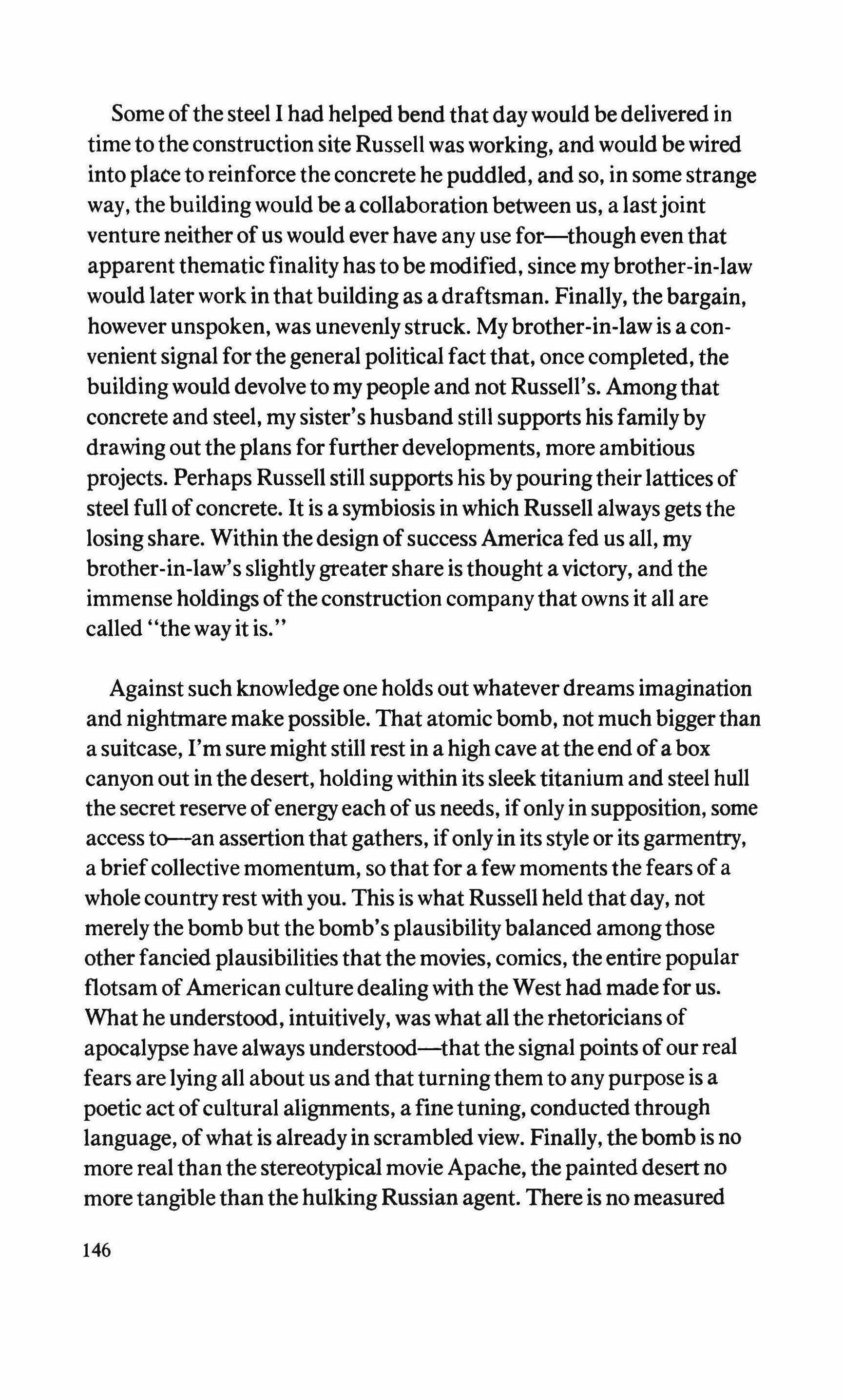
Some ofthe steel I had helped bend that daywould be delivered in time to the construction site Russell was working, and would be wired into place to reinforce the concrete he puddled, and so, in some strange way, the building would be a collaborationbetween us, a lastjoint venture neither of us would ever have any use for-though even that apparent thematic finality has to be modified, since my brother-in-law would later work inthat building as a draftsman. Finally, the bargain, however unspoken, was unevenly struck. My brother-in-law is a convenient signal forthe general political fact that, once completed, the building would devolve to my people and not Russell's. Amongthat concrete and steel, my sister's husband still supports his familyby drawing out the plans forfurtherdevelopments, more ambitious projects. Perhaps Russell still supports his bypouringtheir lattices of steel full of concrete. It is a symbiosis in which Russell always gets the losing share. Within thedesign of success America fed us all, my brother-in-law's slightlygreater share is thought a victory, and the immense holdings ofthe construction company that owns it all are called "the way it is."
Against such knowledge one holds out whatever dreams imagination and nightmare make possible. That atomic bomb, not much biggerthan a suitcase, I'm sure might still rest in a high cave at the end of a box canyon out in the desert, holding within its sleek titanium and steel hull the secret reserve ofenergyeach of us needs, ifonly in supposition, some access t<r-an assertion that gathers, ifonlyin its style or its garmentry, a briefcollective momentum, so that for a few moments the fears of a whole country rest with you. This is what Russell held that day, not merelythe bomb but the bomb's plausibility balanced amongthose other fancied plausibilities that the movies, comics, theentire popular flotsam ofAmerican culturedealing with the West had made for us. What he understood, intuitively, was what all the rhetoricians of apocalypse have always understood-that the signal points of our real fears are lying all about us and that turningthem to any purpose is a poetic act ofcultural alignments, a fine tuning, conducted through language, ofwhat is already in scrambled view. Finally, thebomb is no more real than the stereotypical movie Apache, the painted desert no more tangible than the hulking Russian agent. There is no measured
146
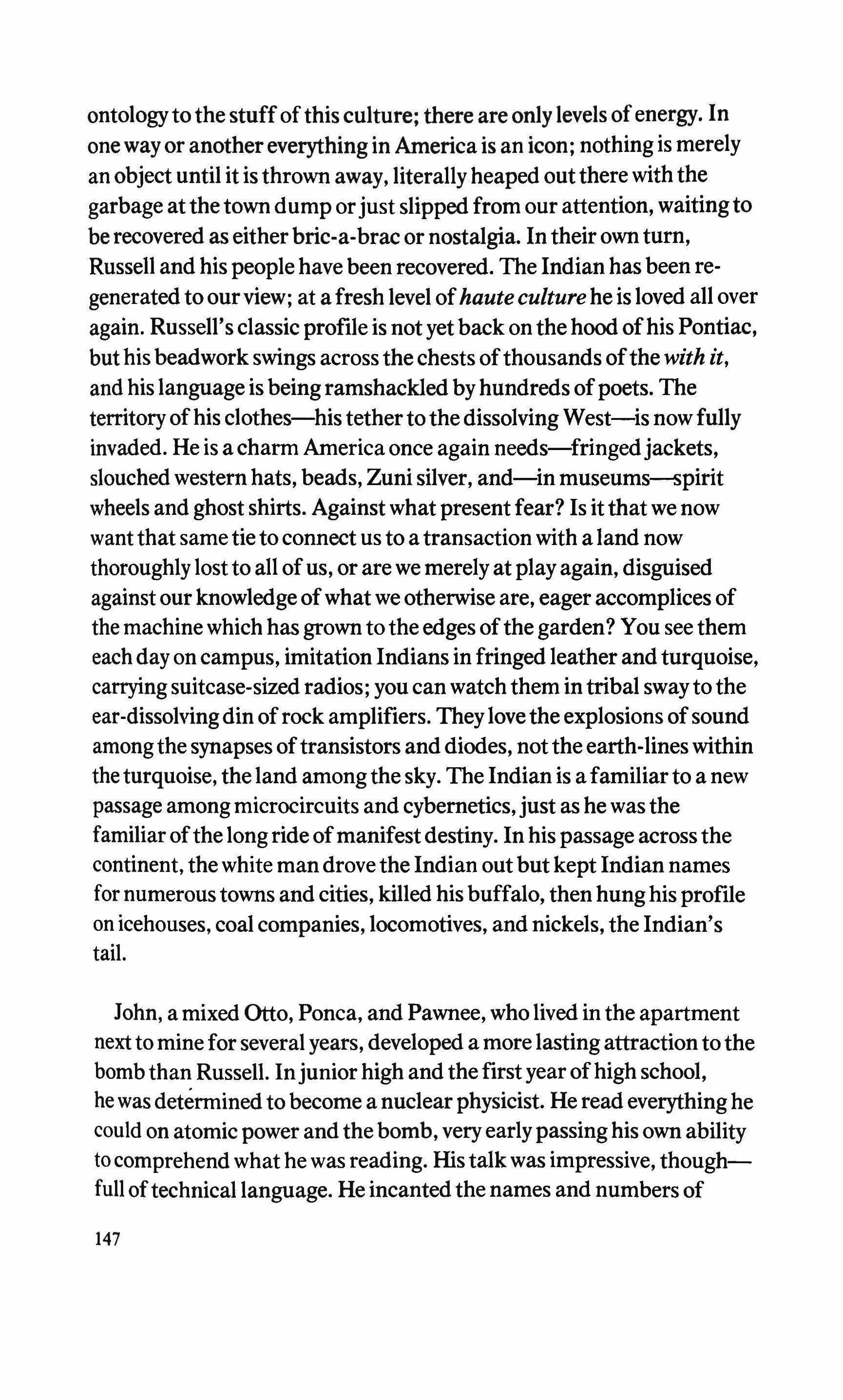
ontology to the stuffofthis culture; there are only levels ofenergy. In one way or anothereverything in America is an icon; nothing is merely an object until itis thrown away, literallyheaped outthere with the garbage at the town dump or justslipped from our attention, waitingto berecovered as eitherbric-a-brac or nostalgia. In their own turn, Russell and his people have been recovered. The Indian has been regenerated to our view; at a fresh level ofhaute culturehe is loved all over again. Russell's classic profile is not yet back on the hood ofhis Pontiac, buthisbeadwork swings across the chests ofthousands ofthe with it, and his language is beingramshackled by hundreds ofpoets. The territoryofhis clothes-his tether to thedissolving West-is now fully invaded. He is a charm America once againneeds-fringedjackets, slouched western hats, beads, Zuni silver, and-in museums-spirit wheels and ghost shirts. Against what present fear? Is itthat we now want that same tie to connect us to a transaction with a land now thoroughly lost to all of us, or are we merely at playagain, disguised against our knowledgeofwhat we otherwise are, eager accomplices of the machine which has grown to the edges ofthe garden? You see them each day on campus, imitation Indians in fringed leather and turquoise, carrying suitcase-sized radios; you can watch them in tribal sway to the ear-dissolvingdin ofrock amplifiers. Theylovethe explosions ofsound amongthe synapses oftransistors and diodes, not the earth-lines within theturquoise, the land among the sky. The Indian is a familiar to a new passage among microcircuits and cybernetics,just as he was the familiar ofthe longride ofmanifestdestiny. In his passage across the continent, thewhite man drove the Indian out but kept Indian names for numerous towns and cities, killed his buffalo, then hung his profile on icehouses, coal companies, locomotives, and nickels, the Indian's tail.
John, a mixed Otto, Ponca, and Pawnee, who lived in the apartment next to mine for several years, developed a more lastingattraction to the bomb than Russell. Injuniorhigh and thefirst yearofhighschool, he was determined to become a nuclear physicist. He read everything he could on atomic power and thebomb, very earlypassing his own ability to comprehend what he was reading. Histalk was impressive, thoughfull oftechnical language. He incanted the names and numbers of
147
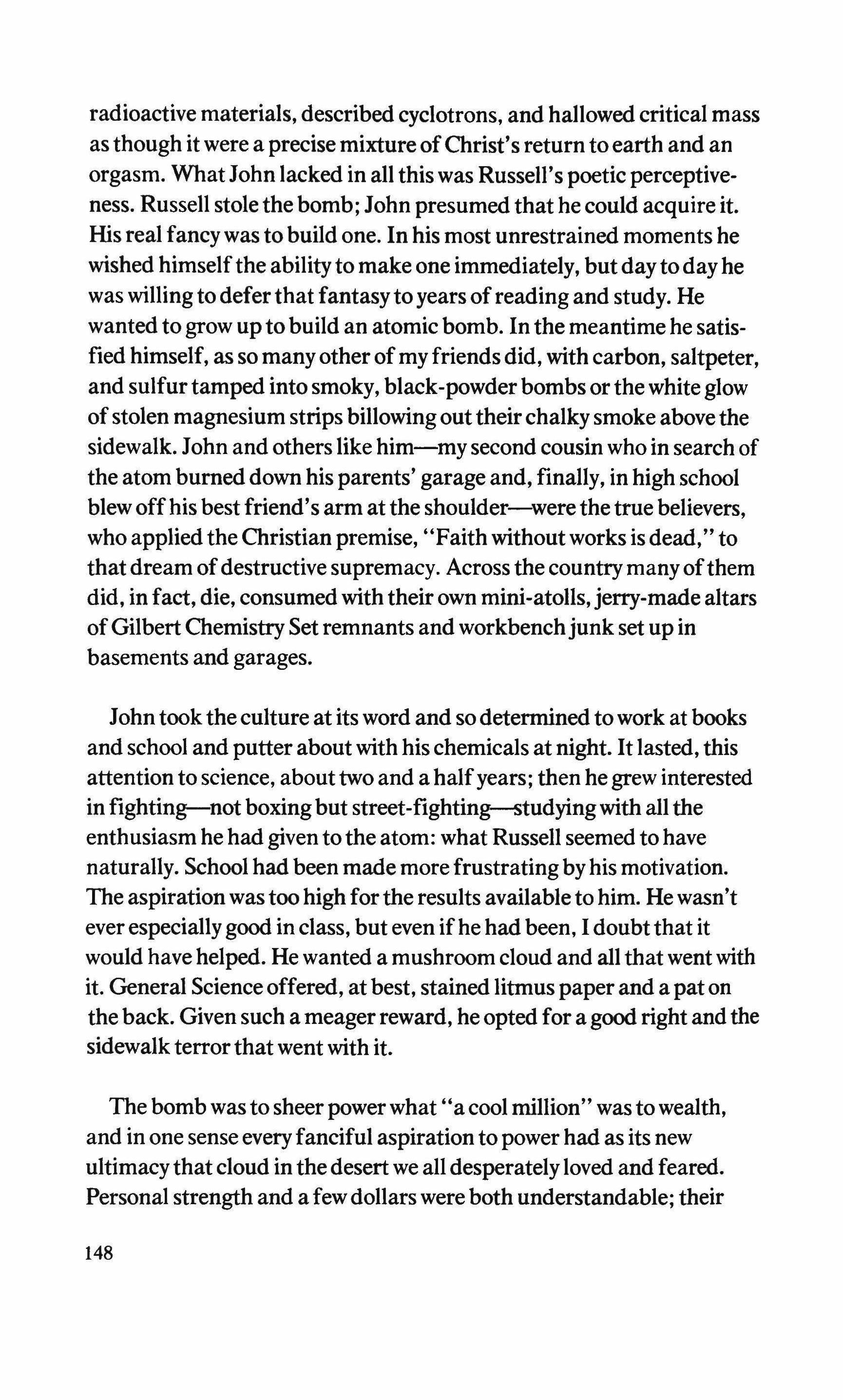
radioactive materials, described cyclotrons, and hallowed critical mass as though it were a precise mixture ofChrist's return to earth and an orgasm. What John lacked in all this was Russell's poeticperceptiveness. Russell stole thebomb; John presumed that he could acquire it. His real fancy was to build one. In his most unrestrained moments he wished himselfthe ability to make one immediately, but dayto dayhe was willing to deferthat fantasyto years of reading and study. He wanted to grow up to build an atomic bomb. In the meantime he satisfied himself, as so many other ofmy friends did, with carbon, saltpeter, and sulfur tamped into smoky, black-powder bombs or thewhite glow ofstolen magnesiumstripsbillowing out theirchalky smoke above the sidewalk. John and others like him-my second cousin who in search of the atom burned down his parents' garage and, finally, in high school blewoffhis best friend's arm at the shoulder-werethe true believers, who applied the Christian premise, "Faith without works is dead," to that dream ofdestructive supremacy. Across the country many ofthem did, in fact, die, consumed with their own mini-atolls,jerry-made altars ofGilbert Chemistry Set remnants and workbenchjunk set up in basements and garages.
John took theculture at its word and so determined to work at books and school and putter about with his chemicals at night. It lasted, this attention to science, about two and a halfyears; then he grew interested in fighting-notboxingbut street-fighting--studyingwith all the enthusiasm he had given to the atom: what Russell seemed to have naturally. School had been made more frustratingbyhis motivation. The aspiration was too high forthe results available to him. He wasn't ever especiallygood in class, but even ifhe had been, I doubtthat it would have helped. He wanted a mushroom cloud and all that went with it. General Science offered, at best, stained litmus paper and a pat on theback. Given such a meagerreward, heopted for a goodright andthe sidewalk terror that went with it.
The bomb was to sheer powerwhat "acool million" was to wealth, and in one sense every fanciful aspiration to power had as its new Ultimacythat cloud in thedesert we all desperately loved and feared. Personal strength and a fewdollars were both understandable; their
148
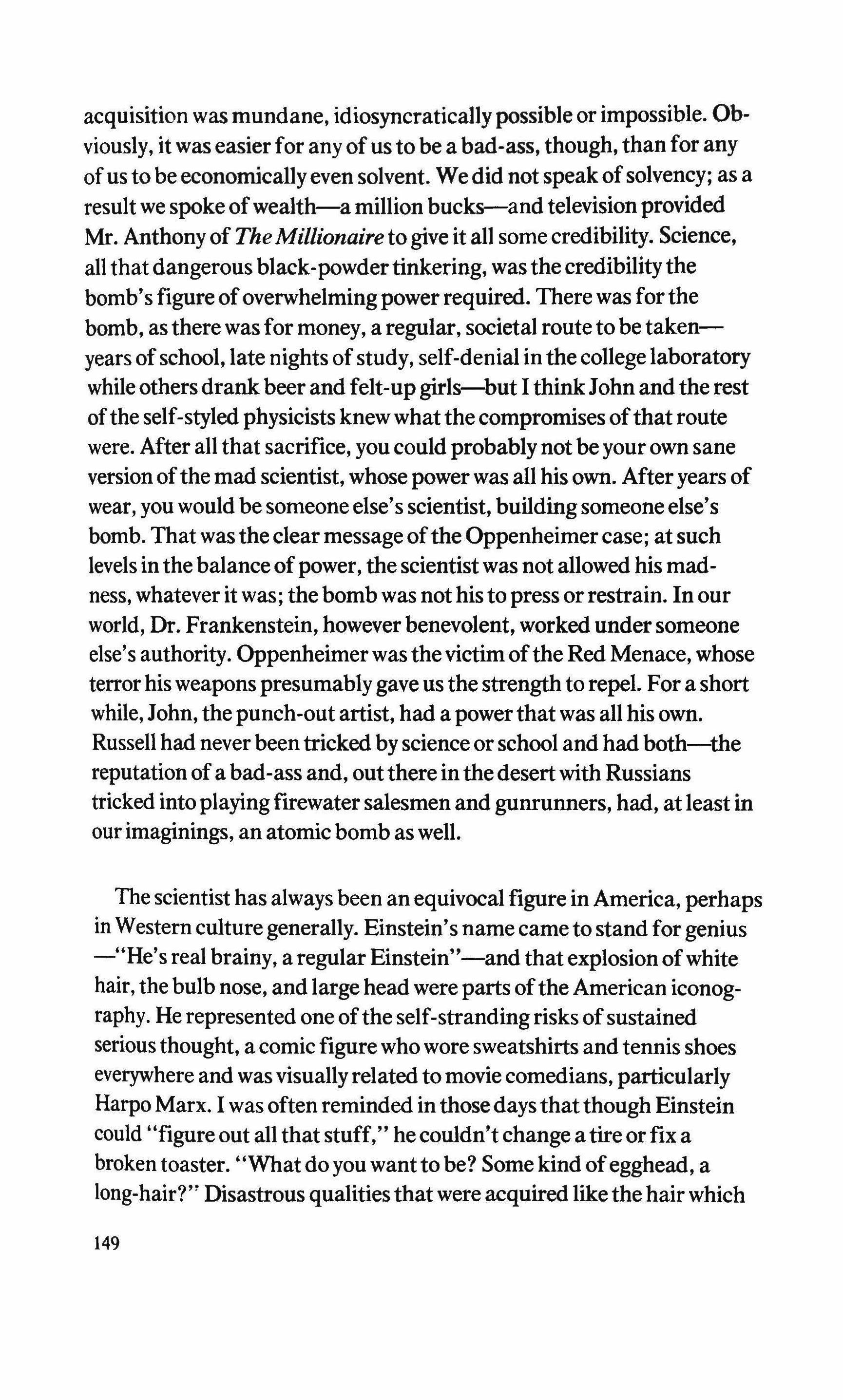
acquisition was mundane, idiosyncraticallypossible or impossible. Obviously, it was easier for any of us to be a bad-ass, though, than for any of us to beeconomically even solvent. We did not speakofsolvency; as a result we spokeofwealth-a million bucks-and televisionprovided Mr. Anthony of TheMillionaire to give it all some credibility. Science, all thatdangerous black-powdertinkering, was the credibilitythe bomb's figure ofoverwhelmingpower required. There was forthe bomb, as there was for money, a regular, societal route to be takenyears ofschool, late nights ofstudy, self-denial in the college laboratory whileothers drank beer and felt-upgirls-but I thinkJohn and the rest ofthe self-styledphysicists knewwhatthecompromises ofthat route were. After all that sacrifice, you could probably not be your own sane versionofthe mad scientist, whose power was all his own. Afteryears of wear, you would be someone else's scientist, building someone else's bomb. That was the clear message ofthe Oppenheimer case; at such levels in the balance ofpower, the scientist was not allowed his madness, whatever it was; thebomb was not his to press or restrain. In our world, Dr. Frankenstein, however benevolent, worked under someone else's authority. Oppenheimer was thevictim ofthe Red Menace, whose terror hisweapons presumably gave us the strength to repel. For a short while,John, the punch-out artist, had a powerthat was all his own. Russell had never been tricked byscience or school and had both-the reputation of a bad-ass and, outthere inthedesertwith Russians tricked into playingfirewater salesmen and gunrunners, had, at least in our imaginings, an atomic bomb as well.
The scientist has always been an equivocalfigure in America, perhaps in Western culture generally. Einstein's name came to stand for genius -"He's real brainy, a regular Einstein"-and that explosion ofwhite hair, the bulb nose, and large head were parts ofthe American iconography. He represented one ofthe self-stranding risks ofsustained seriousthought, a comicfigure who wore sweatshirts and tennis shoes everywhere and was visuallyrelated to movie comedians, particularly Harpo Marx. I was often reminded in thosedaysthatthough Einstein could "figure out all that stuff," hecouldn't change a tire or fix a broken toaster. "Whatdo you want to be? Some kind ofegghead, a long-hair?" Disastrous qualitiesthat were acquired likethe hair which
149
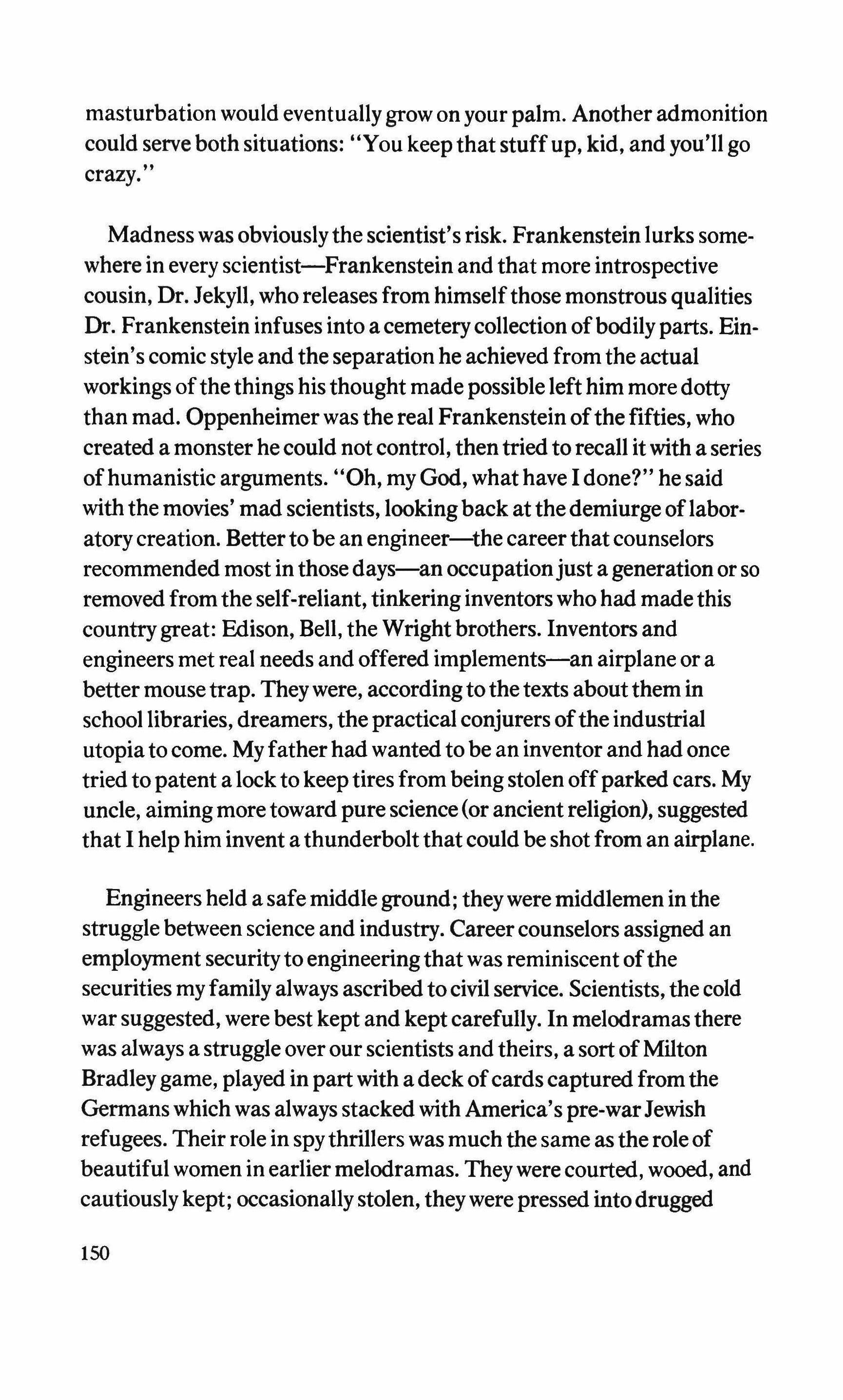
masturbation would eventually grow on your palm. Another admonition could serve both situations: "You keep that stuff up, kid, and you'll go crazy."
Madness was obviouslythe scientist's risk. Frankenstein lurks somewhere in every scientist=-Frankenstein and that more introspective cousin, Dr. Jekyll, who releases from himselfthose monstrous qualities Dr. Frankenstein infuses into a cemeterycollection ofbodilyparts. Einstein's comic style and the separation he achieved from the actual workings ofthe things his thought made possible left him more dotty than mad. Oppenheimer was the real Frankensteinofthe fifties, who created a monster hecould not control, thentried to recall itwith a series ofhumanistic arguments. "Oh, my God, whathave I done?" he said with the movies' mad scientists, lookingback at thedemiurge oflaboratorycreation. Betterto be an engineer-the career thatcounselors recommended most in those days-anoccupationjust a generation or so removed from the self-reliant, tinkering inventors who had madethis countrygreat: Edison, Bell, the Wright brothers. Inventors and engineers met real needs and offered implements-anairplane or a better mouse trap. They were, according to the texts aboutthem in school libraries, dreamers, the practicalconjurers ofthe industrial utopia to come. Myfatherhad wanted to be an inventor and had once tried to patent a lock to keeptires from being stolen offparked cars. My uncle, aiming more toward pure science(or ancient religion), suggested that I help him invent a thunderbolt that could be shot from an airplane.
Engineers held a safe middle ground; they were middlemen in the struggle between science and industry. Careercounselors assigned an employment securityto engineeringthat was reminiscent ofthe securities my familyalways ascribed to civil service. Scientists, the cold war suggested, were best kept and keptcarefully. In melodramas there was always a struggle over our scientists and theirs, a sort ofMilton Bradley game, played in part with a deck ofcards captured fromthe Germans which was always stacked with America's pre-warJewish refugees. Their role in spythrillers was much the same as the roleof beautiful women in earlier melodramas. They were courted, wooed, and cautiouslykept; occasionallystolen, they were pressed intodrugged
150
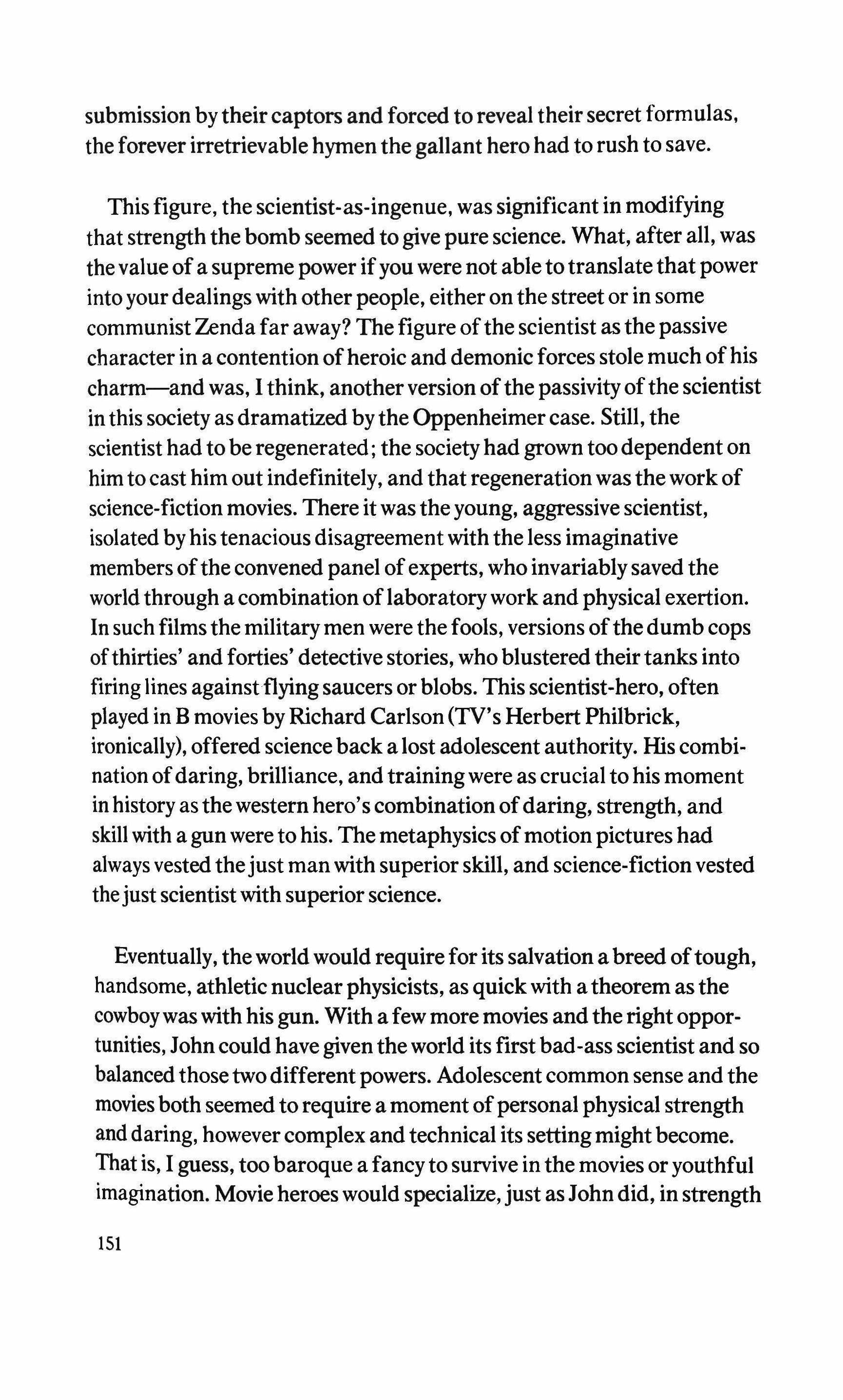
submission bytheircaptors and forced to reveal their secret formulas, the forever irretrievable hymen the gallant hero had to rush to save.
This figure, the scientist-as-ingenue, was significant in modifying that strength the bomb seemed to give pure science. What, after all, was thevalue of a supreme power ifyou were not able to translate that power into yourdealings with other people, either on the street or in some communist Zenda far away? The figure ofthe scientist as the passive character in a contention ofheroic and demonic forces stole much ofhis charm-and was, I think, another version ofthe passivityofthe scientist inthis society as dramatized bythe Oppenheimer case. Still, the scientist had to be regenerated; the societyhad grown too dependent on him to cast him out indefinitely, and that regeneration was thework of science-fictionmovies. There it was the young, aggressivescientist, isolated byhistenacious disagreement with the less imaginative members ofthe convened panel ofexperts, who invariablysaved the world through a combination oflaboratory work and physical exertion. In such filmsthe military men were the fools, versions ofthedumb cops ofthirties' and forties' detective stories, who blustered their tanks into firing lines againstflying saucers or blobs. This scientist-hero, often played in B movies by Richard Carlson (TV's Herbert Philbrick, ironically), offered science back a lost adolescent authority. His combination ofdaring, brilliance, and training were as crucial to his moment inhistory as the western hero's combination ofdaring, strength, and skill with a gun were to his. Themetaphysics ofmotion pictures had always vested thejust man with superior skill, and science-fiction vested thejust scientistwith superior science.
Eventually, the worldwould require forits salvation a breed oftough, handsome, athletic nuclear physicists, as quick with a theorem as the cowboy was with his gun. With a few more movies and the right opportunities, John could have given the world its first bad-ass scientist and so balanced those two different powers. Adolescent common sense and the movies both seemed to require a moment ofpersonalphysical strength and daring, howevercomplex and technical its settingmight become. That is, I guess, too baroque a fancy to survive in the movies or youthful imagination. Movie heroes would specialize,just as John did, in strength
151
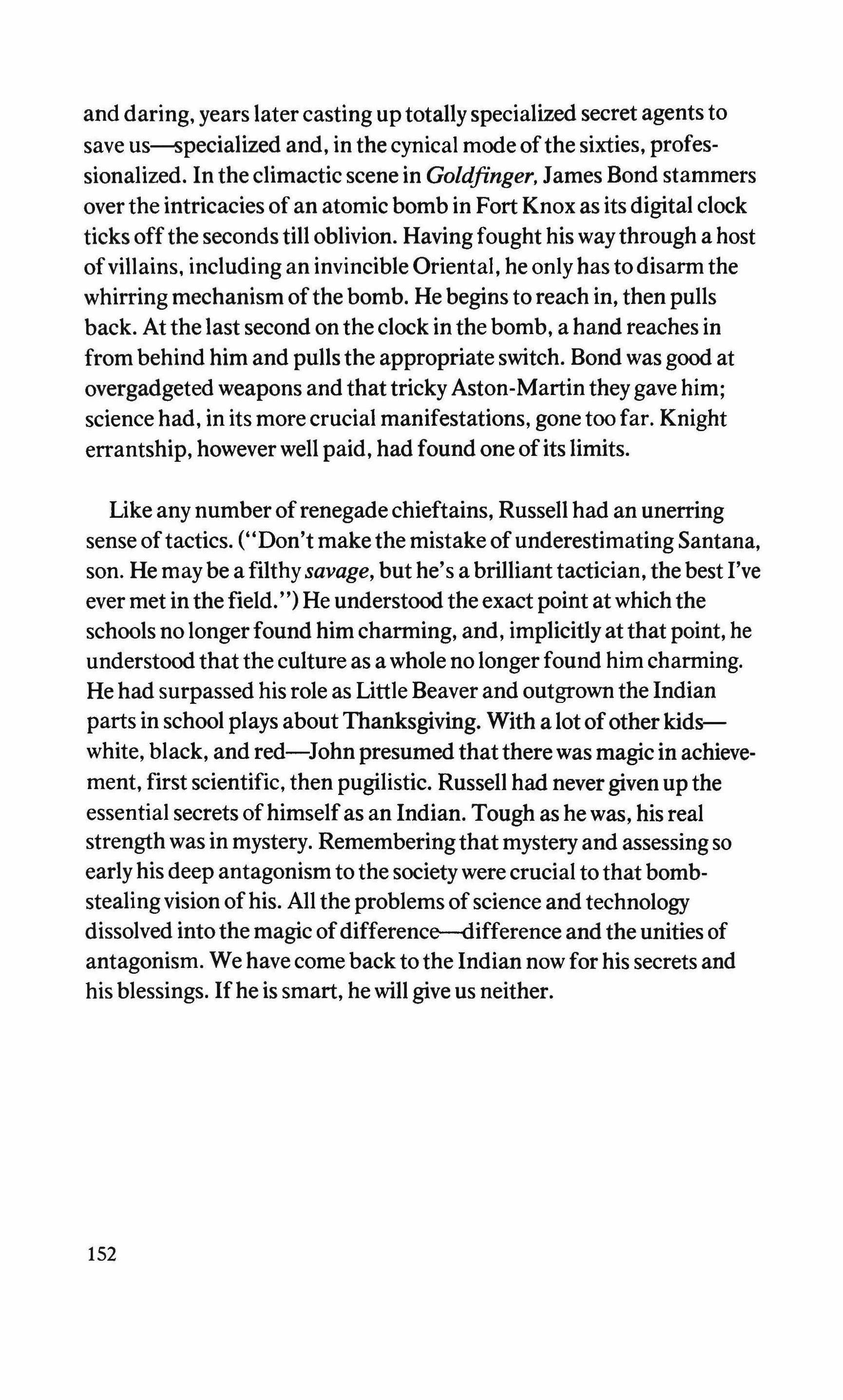
and daring, years later casting up totallyspecialized secret agents to save us--specialized and, in the cynical mode ofthe sixties, professionalized. In the climactic scene in Goldfinger, James Bond stammers over the intricacies of an atomic bomb in Fort Knox as its digital clock ticks offthe seconds till oblivion. Havingfought his way through a host ofvillains, including an invincible Oriental, he onlyhas to disarm the whirring mechanism ofthe bomb. He begins to reach in, then pulls back. At the last second on the clock in the bomb, a hand reaches in from behind him and pulls the appropriate switch. Bond was good at overgadgeted weapons and that trickyAston-Martin they gave him; science had, in its more crucial manifestations, gone too far. Knight errantship, however well paid, had found one ofits limits.
Like any number ofrenegadechieftains, Russell had an unerring sense oftactics. ("Don't make the mistake of underestimating Santana, son. He may be a filthy savage, but he's a brilliant tactician, the best I've ever met in the field.'') He understood the exact point at which the schools no longerfound him charming, and, implicitly at that point, he understood that the culture as a whole no longer found him charming. He had surpassed his role as Little Beaver and outgrown the Indian parts in school plays about Thanksgiving. With a lotofotherkidswhite, black, and red-John presumed that there was magic in achievement, first scientific, then pugilistic. Russell had never given up the essential secrets ofhimself as an Indian. Tough as he was, his real strength was in mystery. Rememberingthat mystery and assessing so earlyhis deepantagonism to the society were crucial to that bombstealingvision ofhis. All the problems of science and technology dissolved intothe magic ofdifference-difference and the unities of antagonism. We have come back to the Indian now for his secrets and his blessings. Ifhe is smart, he will give us neither.
152
A balance of nature
Daniel Halpern
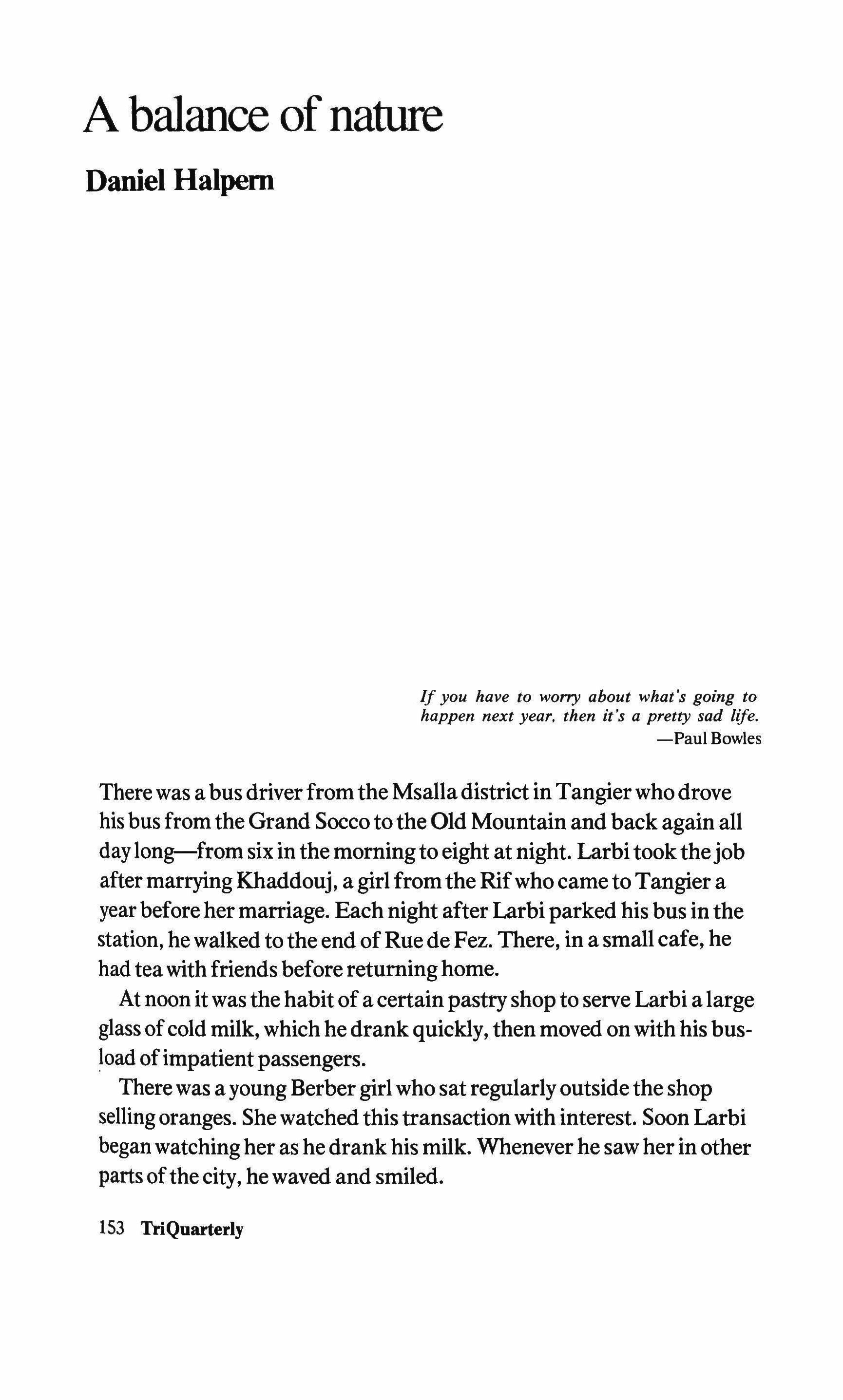
If you have to worry about what's going to happen next year, then it's a pretty sad life.
-Paul Bowles
There was a bus driverfromthe Msalladistrict in Tangier whodrove his bus fromthe Grand Socco to the Old Mountain and back again all daylong-from six inthemorning to eight at night. Larbitookthejob aftermarryingKhaddouj, a girl fromthe Rifwho came to Tangier a year before hermarriage. Each night after Larbi parked his bus inthe station, he walked to the end ofRue de Fez. There, in a small cafe, he had teawith friends beforereturninghome.
At noon it was thehabitof a certain pastryshop to serve Larbi a large glass ofcold milk, which he drank quickly, then moved on with his busload ofimpatient passengers.
There was a young Berber girl who sat regularlyoutsidethe shop selling oranges. Shewatched this transaction with interest. Soon Larbi beganwatching her as he drank his milk. Whenever he saw her in other parts ofthe city, hewaved and smiled. 153 TriQuarterly
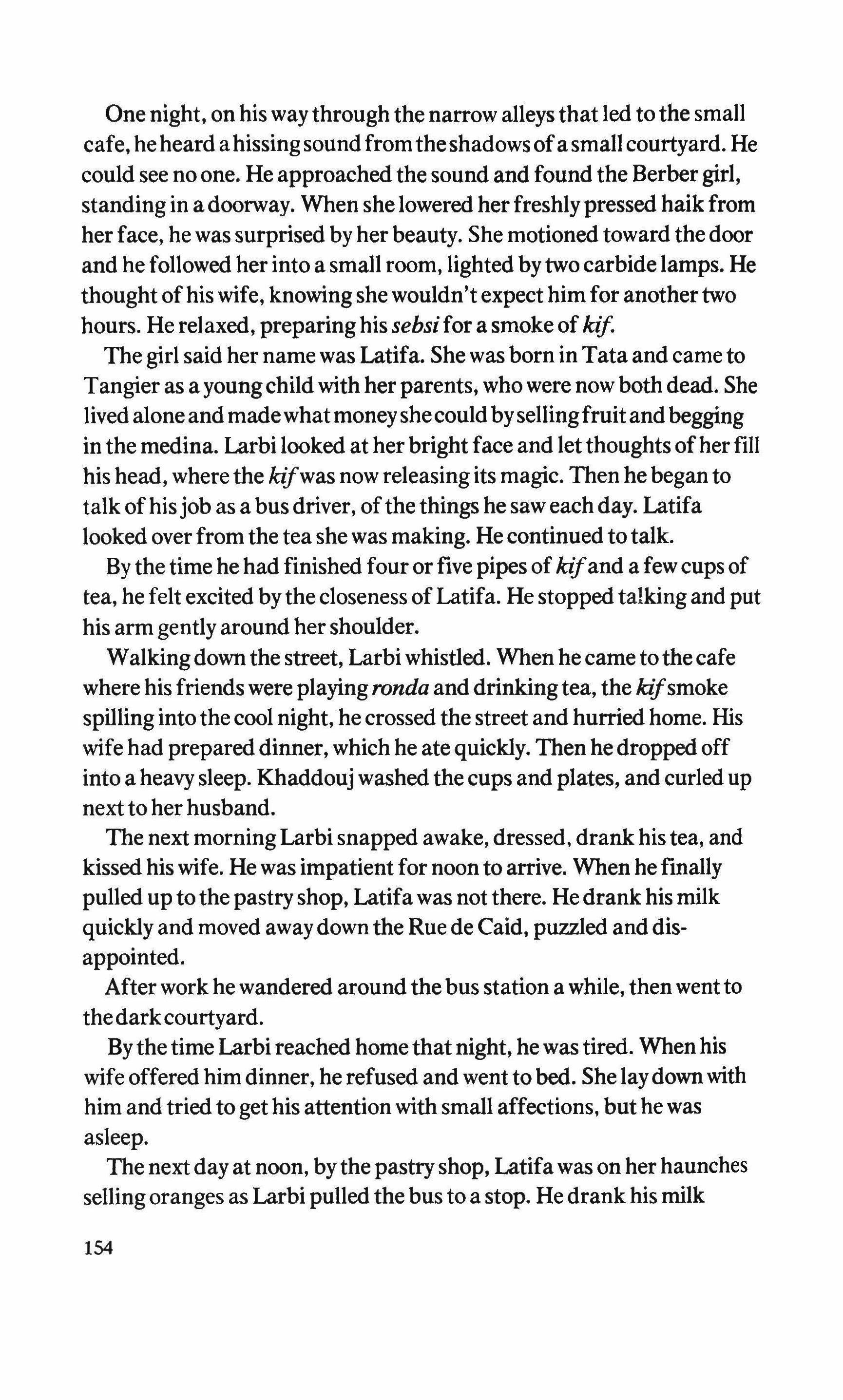
One night, on his way through the narrow alleys that led to the small cafe, heheard a hissingsound fromtheshadowsofa small courtyard. He could see no one. He approached the sound and found the Berber girl, standing in a doorway. When she lowered herfreshlypressed haik from her face, he was surprised by her beauty. She motioned toward the door and he followed her into a small room, lightedby two carbide lamps. He thought ofhis wife, knowing she wouldn't expect him for another two hours. He relaxed, preparinghis sebsi for a smoke ofkif.
The girl said her name was Latifa. She was born in Tata and came to Tangier as a youngchild with her parents, who were now both dead. She lived aloneandmadewhatmoneyshecouldbysellingfruitand begging in the medina. Larbi looked at her bright face and let thoughts ofher fill his head, where the kifwas now releasing its magic. Then he began to talk ofhisjob as a bus driver, ofthe things he saw each day. Latifa looked over from the tea she was making. He continued to talk.
By the time he had finished four or five pipes ofkifand a fewcups of tea, he felt excited bythe closeness ofLatifa. He stoppedtalkingand put his arm gently around her shoulder.
Walkingdown the street, Larbi whistled. When he came to thecafe where his friends were playing ronda and drinkingtea, the kifsmoke spillinginto the cool night, he crossed the street and hurried home. His wife had prepareddinner, which he ate quickly. Then hedropped off into a heavysleep. Khaddouj washed the cups and plates, and curled up next to her husband.
The next morningLarbi snapped awake, dressed, drank his tea, and kissed his wife. He was impatient for noon to arrive. When he finally pulled up to the pastry shop, Latifa was not there. He drank his milk quickly and moved away down the Rue de Caid, puzzled and disappointed.
After work he wandered around the bus station a while, then wentto thedarkcourtyard.
Bythe time Larbi reached homethat night, he was tired. When his wife offered him dinner, he refused and went to bed. She laydownwith him and tried to get his attention with small affections, but he was asleep.
The next day at noon, bythe pastryshop, Latifa was on her haunches selling oranges as Larbi pulled the bus to a stop. He drank his milk
154
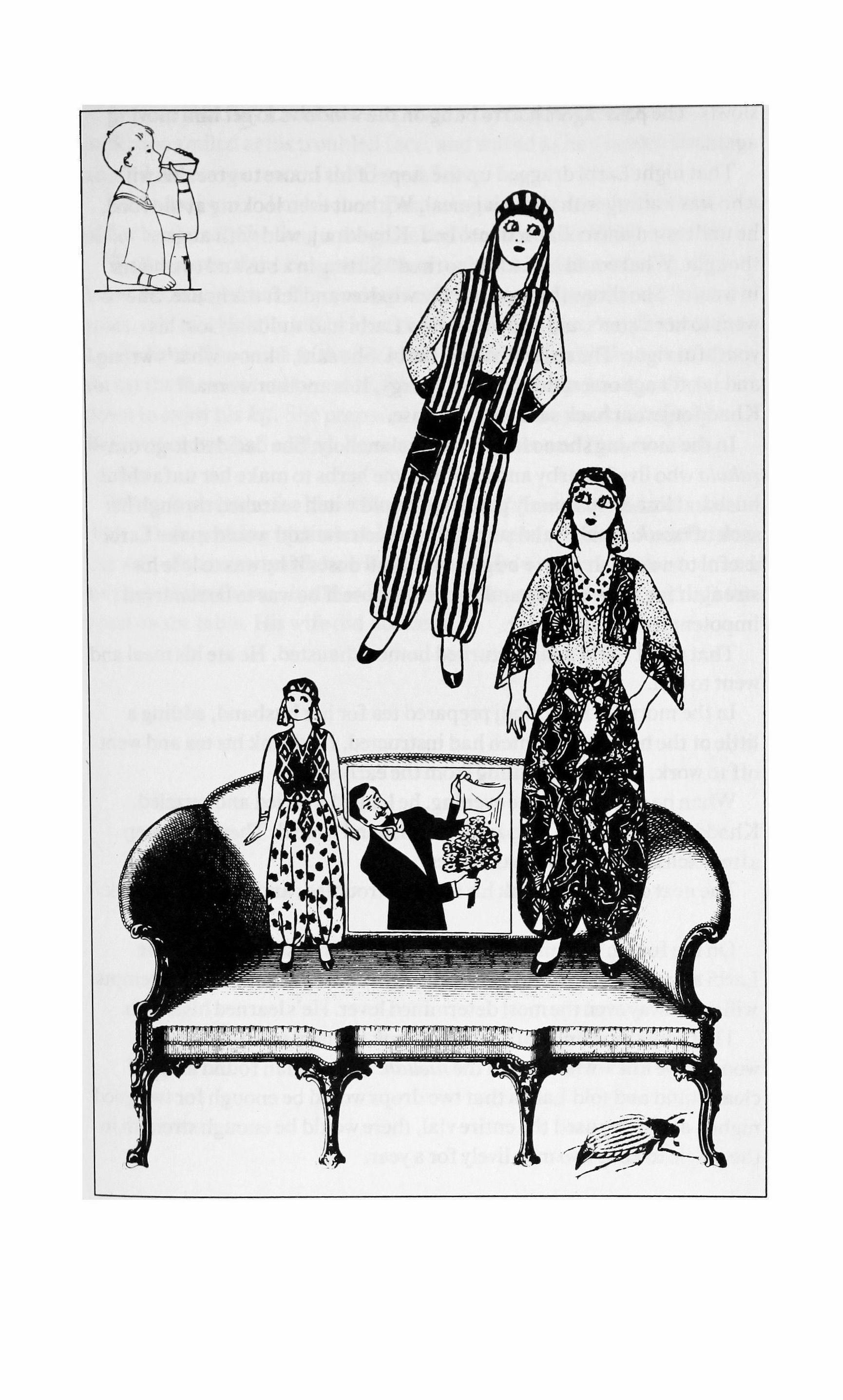

slowly. The passengers had to bang on the windows to get him moving again.
That night Larbi dragged up the steps ofhis house to greet his wife, who was waitingwith a special meal. Without even looking at the food, he undressed and collapsed into bed. Khaddouj, wild with anger, thought, Whatcould makehim so tired? Sittingin a bus and twohours in a cafe? She threwthe food out the window and left the house. She went to her sister's and explained how Larbi had suddenlylost his youthfulvigor. The sisterdisliked Larbi. She said, I knowwhat's wrong, and it isn't age or a sudden loss ofenergy. It is another woman! Khaddouj went back sadlyto her house.
In the morning she no longer felt melancholy. She decided to go to a sahala who lived nearby and ask for some herbs to make her unfaithful husband lose all his manly powers. The old witch searched through her sack of tsoukeland found something which she said would make Larbi useful to no one. It was to be given in small doses ifhe was to lose his strength for a day or two, and in one bigdose ifhe was to be rendered impotent for an entireyear.
That night Larbi again returned home exhausted. He ate his meal and went to bed.
In the morningKhaddouj prepared tea for her husband, adding a little ofthe herb, as thewitch had instructed. He drank his tea and went offto work, a light rain falling from the earlysky. When he returned in theevening, he looked worried and puzzled. Khaddouj smiled and prepared her husband's meal. Theyfell asleep after exchanging a fewpleasantries.
The next day Larbi drank his tea, still troubled, and went offto work.
On the fourth morningKhaddouj decided that shewouldn't give Larbi any more ofthe magic. She thought, Three unsuccessful attempts willturn awayeven themostdetermined lover. He'slearnedhislesson.
That same morning Latifa went to seekthe help of an old Arab woman she knew wholived in the mellah. The woman found a vial of clearliquid and told Latifathat two drops would be enough for two good nights, and if she used the entirevial, there would be enoughstrength in the magic to keep two men lively for a year.
156
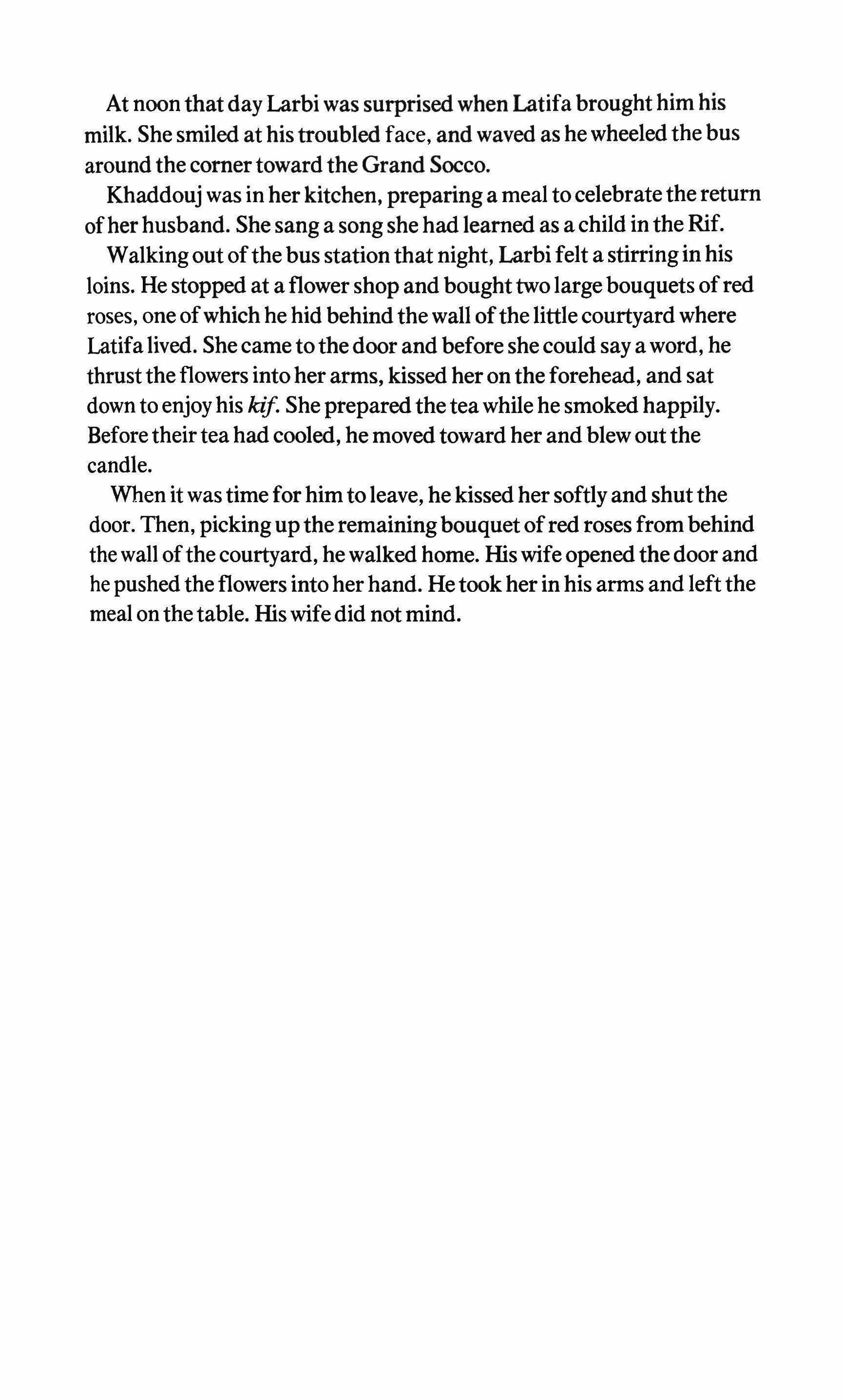
At noon that day Larbi was surprised when Latifa brought him his milk. She smiled at histroubled face, and waved as he wheeled the bus around the corner toward the Grand Socco.
Khaddouj was in her kitchen, preparing a meal to celebratethe return ofherhusband. She sang a song she had learned as a child in the Rif. Walking out ofthe bus station that night, Larbi felt a stirringin his loins. He stopped at a flower shop and bought two largebouquets ofred roses, one ofwhich he hid behind the wall ofthe little courtyard where Latifalived. She came to thedoor and before she could say a word, he thrusttheflowers intoher arms, kissed her on the forehead, and sat down to enjoyhis kif. She prepared the tea while he smoked happily. Beforetheir tea had cooled, he moved toward her and blew out the candle.
When it was time forhim to leave, he kissed her softlyand shutthe door. Then, pickingupthe remainingbouquet ofred roses from behind the wall ofthe courtyard, he walked home. His wife opened the door and he pushed the flowers into herhand. Hetook her in his arms and left the meal on thetable. Hiswifedid not mind.
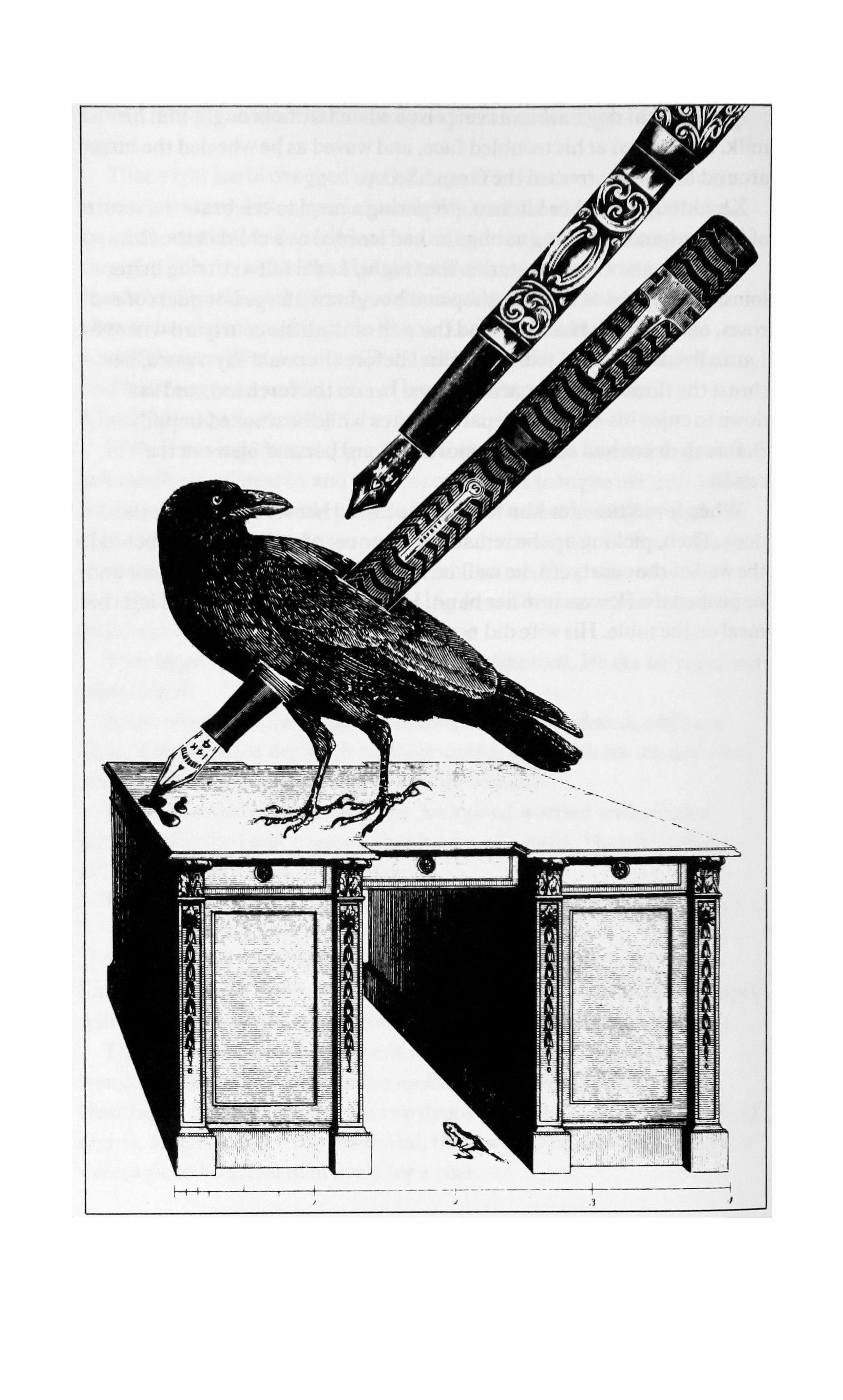
Interview with Paul Bowles
Daniel Halpern
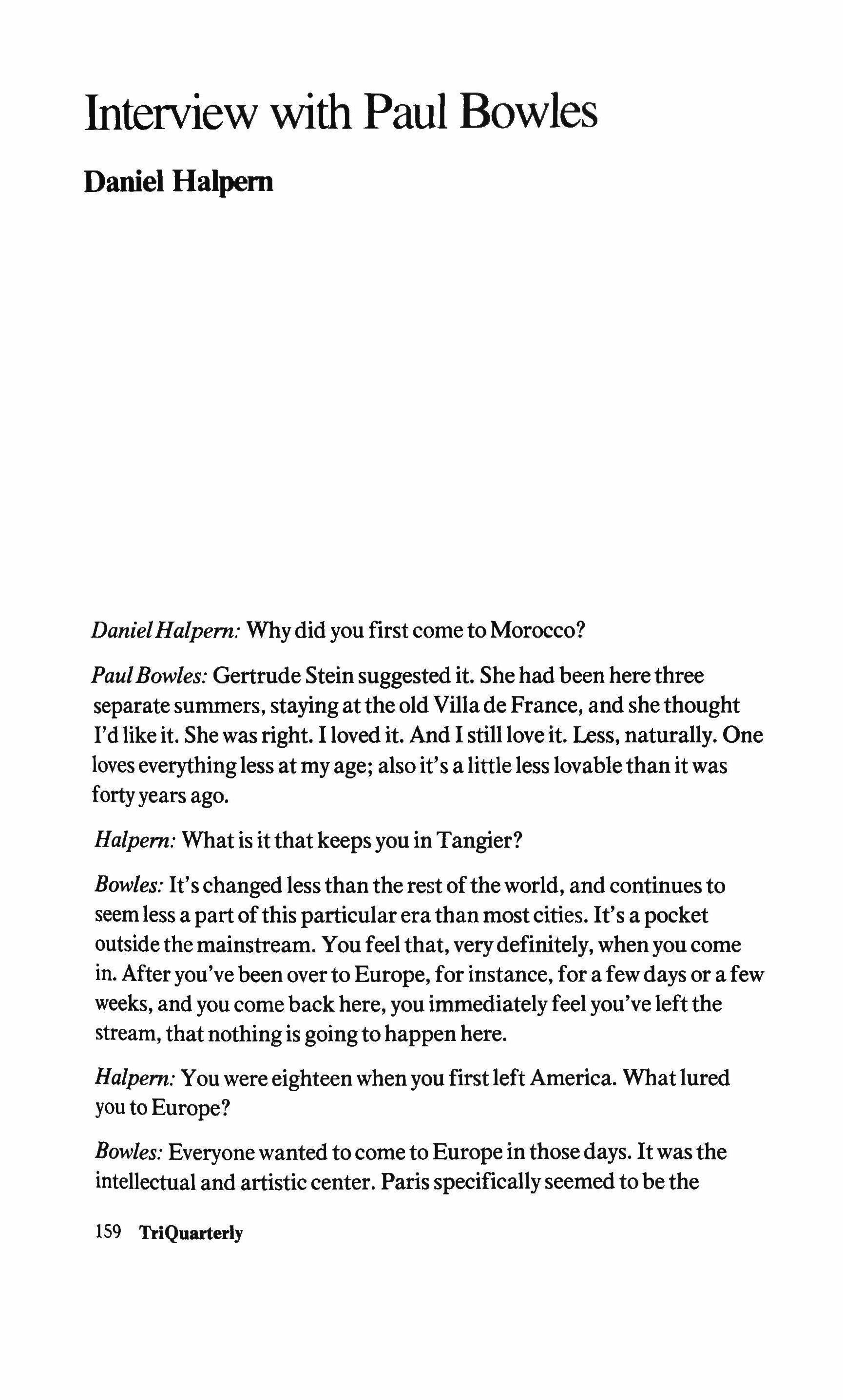
DanielHalpern: Whydid you first come to Morocco?
PaulBowles: Gertrude Stein suggested it. She had been herethree separate summers, staying at the old Villade France, and shethought I'd like it. She was right. I loved it. And I still love it. Less, naturally. One loves everythingless at my age; also it's a little less lovablethan it was fortyyears ago.
Halpern: What is itthat keeps you in Tangier?
Bowles: It's changed lessthan the rest oftheworld, and continues to seem less a part ofthis particular era than most cities. It's a pocket outsidethe mainstream. You feel that, verydefinitely, when you come in. Afteryou've been over to Europe, for instance, for a fewdays or a few weeks, and you come back here, you immediatelyfeel you've left the stream, that nothingis goingto happen here.
Halpern: You were eighteen when you first left America. Whatlured you to Europe?
Bowles: Everyone wanted to come to Europe in thosedays. It was the intellectual and artistic center. Paris specifically seemed to be the 159 TriQuarterly

center, notjust Europe. After all, it was the end ofthe twenties and just about everybody was in Paris.
Halpern: Did you know many writers and composers in Paris?
Bowles: Practically no writers. I met a lot but I didn't know them. Composers? Naturally, Virgil Thomson, and Henri Sauguet and Francis Poulenc Not very many, no.
Halpern: Did you see much ofGertrude Stein while you were there?
Bowles: Idid see a lot of her in 1931. She had read some ofthe poems I had published, and she didn't like them. I went around in 1931, and I remember she mentioned Bravig Imbs, a poet at that time who wrote for various magazines, and she said, "Yes, Bravig Imbs is a very bad poet, but you're not a poet at all." She also had things to say about my music. I played her my music in 1931 and she said, "It's interesting." And then I went back in 1932 to her country house in Bilignin and played some newer music for her, and she said, "Ah, last year your music wasn't attenuated enough, and this year it's too attenuated." That's all she had to say. Exceptthat she told me to come to Tangier. She was liking me at the time, which meant that I could trust herrecommendation. The next year, when she was not liking me at all, she suggested I go to Mexico, adding after a pause, "You'd last about two days."
Halpern: Was she in favor ofyour giving up music and devoting more time to yourwriting?
Bowles: I suspect she thought I had no ability to write. I remember we were sitting in the garden at Bilignin and she said, "I told you lastweek what was the matter with your poetry. What have you done with it since then, with those particularpoems? Have you rewritten them?" And I said, "No, of course not; they'vealready been published that way. How could I rewrite them?" And she said, "You see! I told you you were not a poet. A real poet would have gone up and worked on them and then brought them down and showed them to me a week later, and you've done nothing whatever."
Halpern: What was it about writing that madeyou putcomposing aside?
160
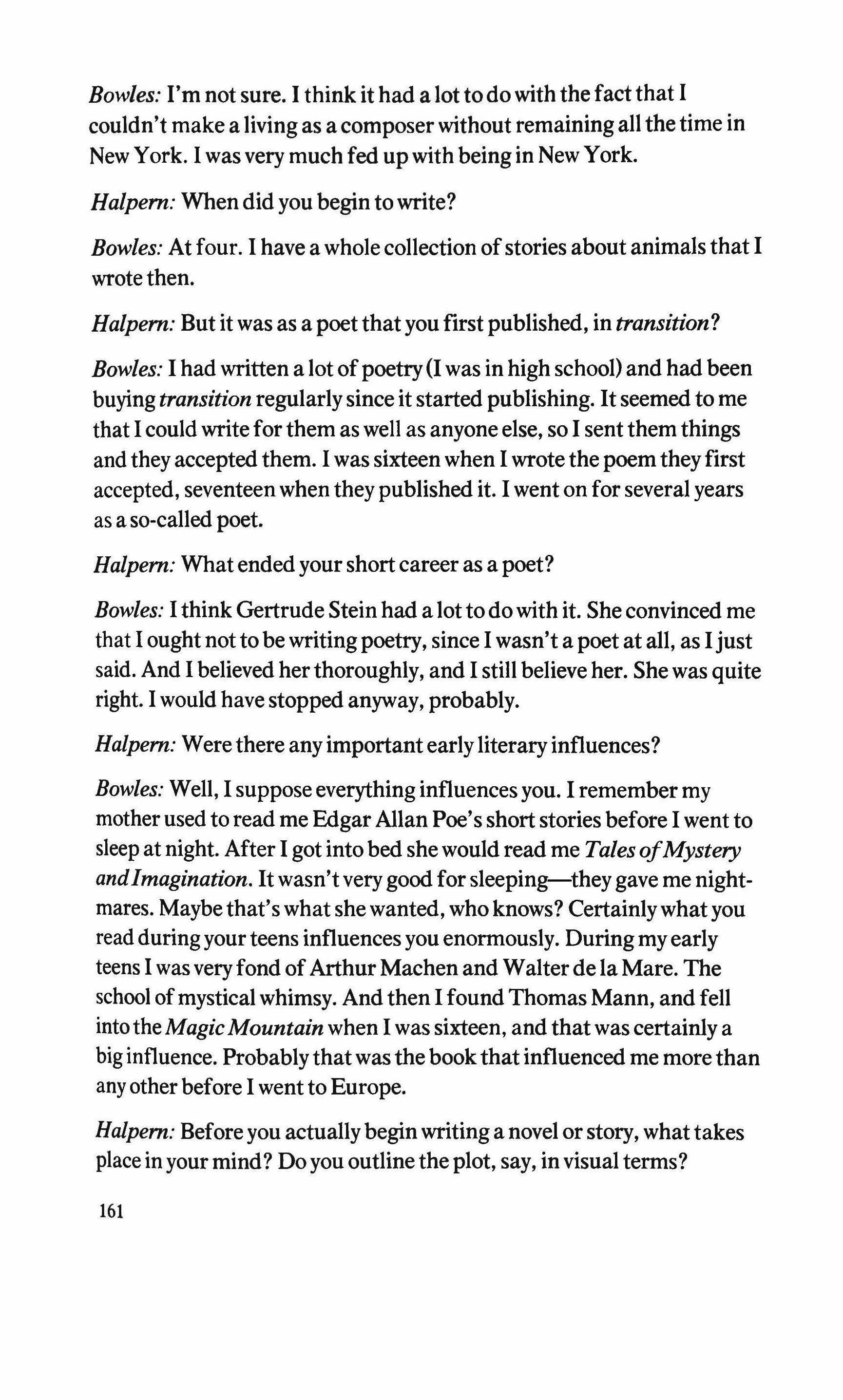
Bowles: I'm not sure. I think it had a lot to do with the fact that I couldn't make a living as a composer without remaining all the time in New York. I was very much fed up with being in New York.
Halpern: When did you begin to write?
Bowles: At four. I have a whole collection ofstories about animals that I wrote then.
Halpern: But it was as a poet thatyou first published, in transition?
Bowles: I had written a lot ofpoetry(I was in high school) and had been buying transition regularly since it started publishing. It seemed to me that I could write for them as well as anyone else, so I sent them things and theyaccepted them. I was sixteen when I wrote the poemtheyfirst accepted, seventeen when theypublished it. I went on for several years as a so-called poet.
Halpern: What ended your short career as a poet?
Bowles: I think Gertrude Stein had a lot to do with it. She convinced me that I ought not to be writingpoetry, since I wasn't a poet at all, as Ijust said. And I believed herthoroughly, and I still believe her. She was quite right. I would have stopped anyway, probably.
Halpern: Werethere anyimportantearlyliteraryinfluences?
Bowles: Well, I suppose everything influences you. I remember my mother used to read me Edgar Allan Poe's short stories before I went to sleep at night. After I got intobed shewould read me TalesofMystery andlmagination. It wasn't very good for sleeping-they gave me nightmares. Maybethat's what shewanted, who knows? Certainlywhat you read during your teens influences you enormously. During myearly teens I was very fond of Arthur Machen and Walterde la Mare. The school ofmysticalwhimsy. And then I found Thomas Mann, and fell intotheMagicMountain when I was sixteen, and that was certainly a biginfluence. Probablythat was the bookthat influenced me more than any otherbefore I went to Europe.
Halpern: Before you actuallybeginwriting a novel or story, whattakes place in your mind? Do you outline the plot, say, in visual terms?
161
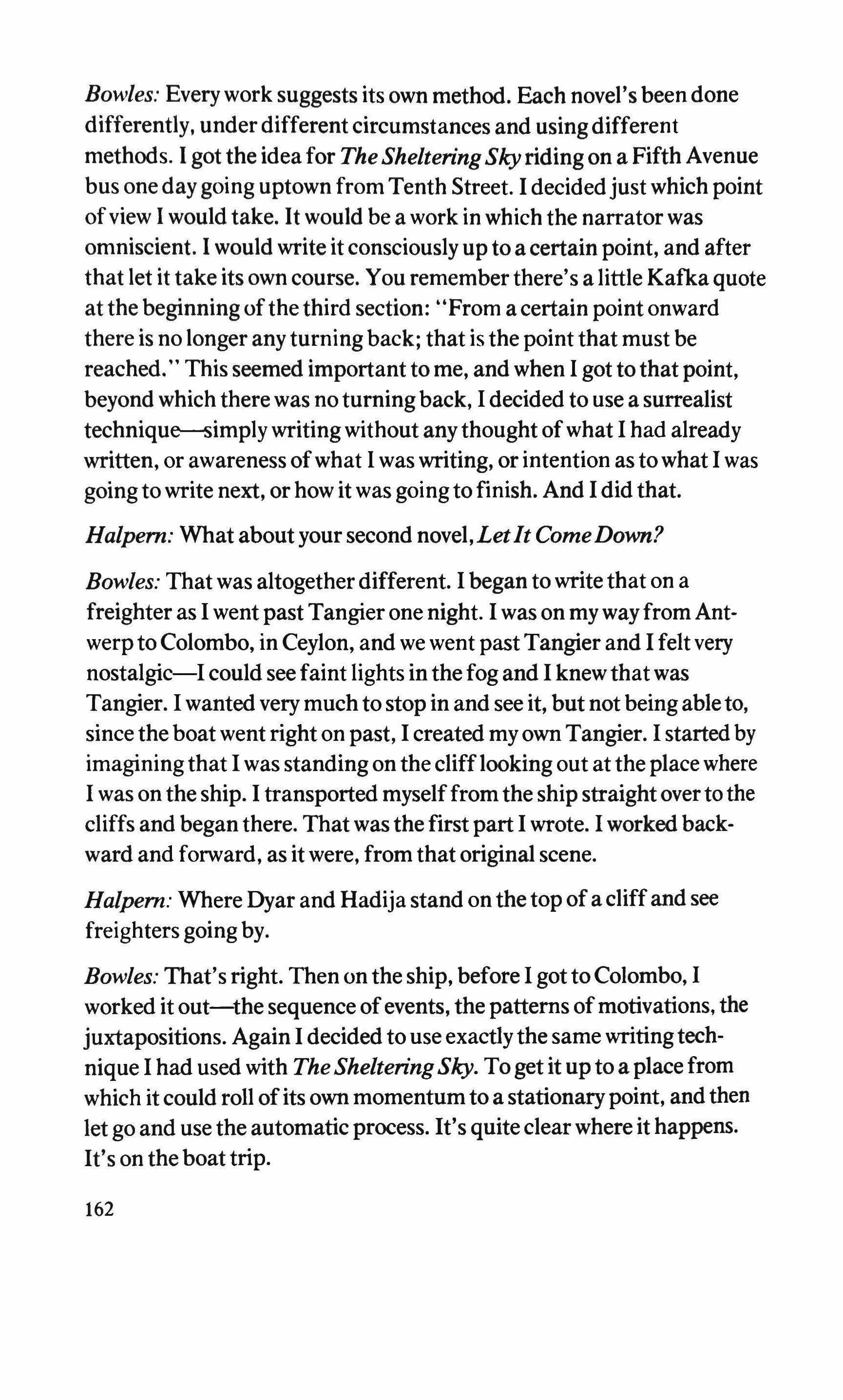
Bowles: Every work suggests its own method. Each novel's been done differently, under different circumstances and usingdifferent methods. I got the idea for TheShelteringSkyriding on a Fifth Avenue bus one daygoing uptown from Tenth Street. I decidedjust which point ofview I would take. It would be a work in which the narrator was omniscient. I would write it consciously up to a certain point, and after that let it take its own course. You remember there's a little Kafka quote at the beginning ofthe third section: "From a certain point onward there is no longer any turningback; that is the point that must be reached." This seemed important to me, and when I got to that point, beyond which there was no turningback, I decided to use a surrealist technique=-simplywritingwithout any thought ofwhat I had already written, or awareness ofwhat I was writing, or intention as towhat I was going to write next, or how it was going to finish. And I did that.
Halpern: What about your second novel,LetIt ComeDown?
Bowles: That was altogether different. I began to write that on a freighter as I went past Tangier one night. I was on my wayfrom Antwerp to Colombo, in Ceylon, and we went pastTangier and I felt very nostalgic-I could see faint lights in thefog and I knewthatwas Tangier. I wanted very much to stop in and see it, but not beingableto, since the boat went right on past, I created my own Tangier. I started by imagining that I was standing on the clifflooking out at the place where I was on the ship. I transported myselffrom the shipstraight over to the cliffs and began there. That was the first part I wrote. I worked backward and forward, as it were, from that original scene.
Halpern: Where Dyar and Hadija stand on the top of a cliffand see freightersgoingby.
Bowles: That's right. Then on the ship, before I got to Colombo, I worked it out-the sequence ofevents, the patterns ofmotivations, the juxtapositions. Again I decided to use exactlythe same writingtechnique I had used with TheShelteringSky. To get it up to a place from which it could roll ofits own momentum to a stationarypoint, and then let go and use the automatic process. It's quite clear where it happens. It's on the boattrip.
162
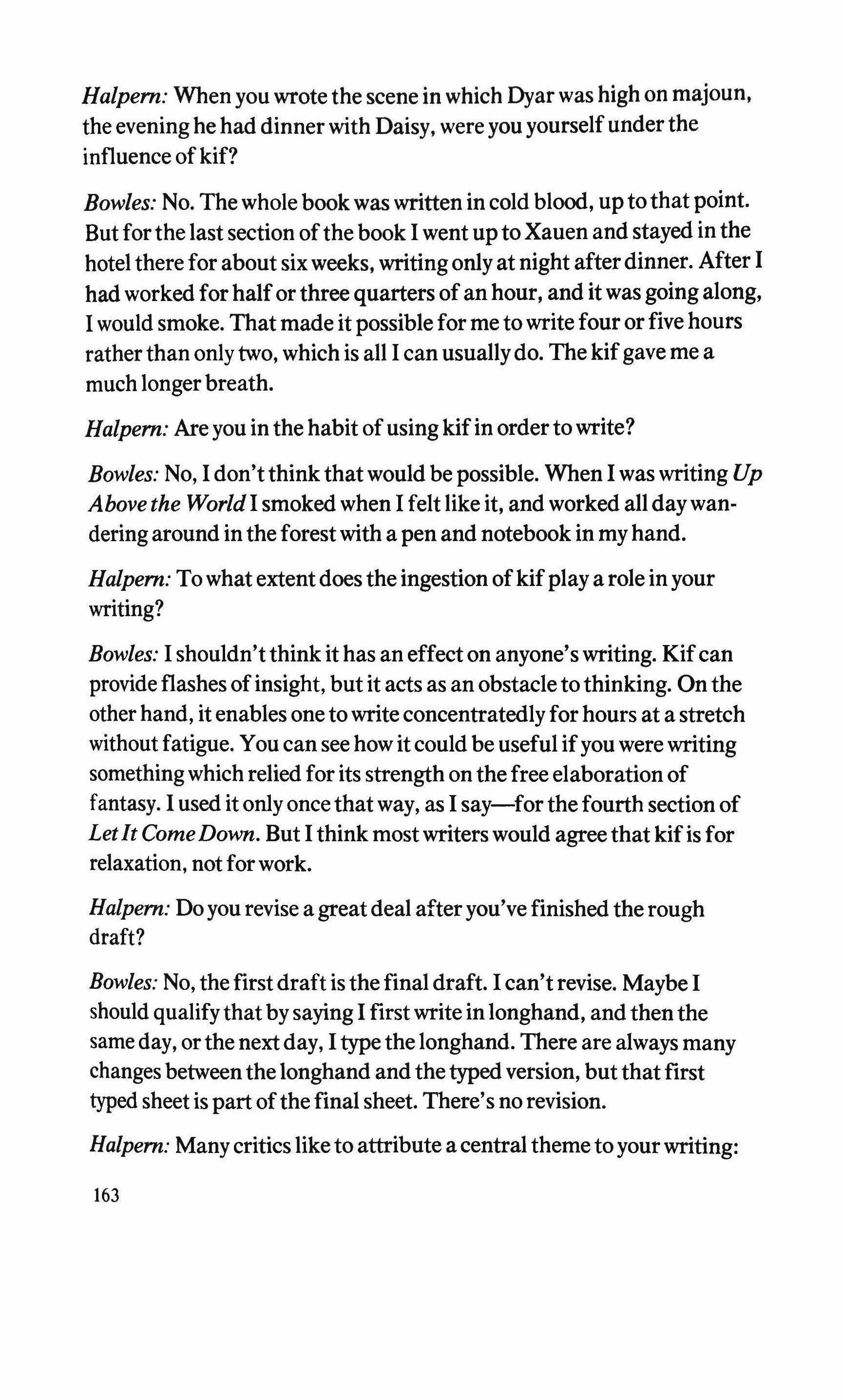
Halpern: When you wrote the scene in which Dyar was high on majoun, the eveninghe had dinner with Daisy, were you yourselfunder the influence ofkif?
Bowles: No. The whole book was written in cold blood, up to that point. But forthe last section ofthe book I went up to Xauen and stayed in the hotel there for about six weeks, writingonly at night after dinner. After I had worked forhalf or three quarters of an hour, and it was goingalong, I would smoke. That made it possible for me to write four or five hours ratherthan onlytwo, which is all I can usuallydo. The kifgave me a much longerbreath.
Halpern: Are you in the habit ofusing kifin order to write?
Bowles: No, I don'tthink that would be possible. When I was writing Up Above the WorldI smoked when I felt like it, and worked all day wanderingaround inthe forestwith a pen and notebook in myhand.
Halpern: Towhat extent does the ingestion ofkifplaya role inyour writing?
Bowles: I shouldn't think it has an effect on anyone'swriting. Kif can provide flashes ofinsight, but it acts as an obstacle to thinking. On the other hand, itenables one to write concentratedly for hours at a stretch without fatigue. You can see howitcould be useful ifyou were writing somethingwhich relied for its strength on thefree elaboration of fantasy. I used it only once that way, as I say-for thefourth section of LetIt ComeDown. But I think most writers would agree that kifis for relaxation, not forwork.
Halpern: Doyou revise a great deal afteryou've finished the rough draft?
Bowles: No, thefirstdraft is the final draft. I can't revise. Maybe I should qualifythatbysaying I first write inlonghand, and then the same day, or the next day, I type thelonghand. There are always many changes betweenthe longhand and thetyped version, butthat first typed sheet is part ofthe final sheet. There's no revision.
Halpern: Many critics like to attribute a central theme toyour writing:
163
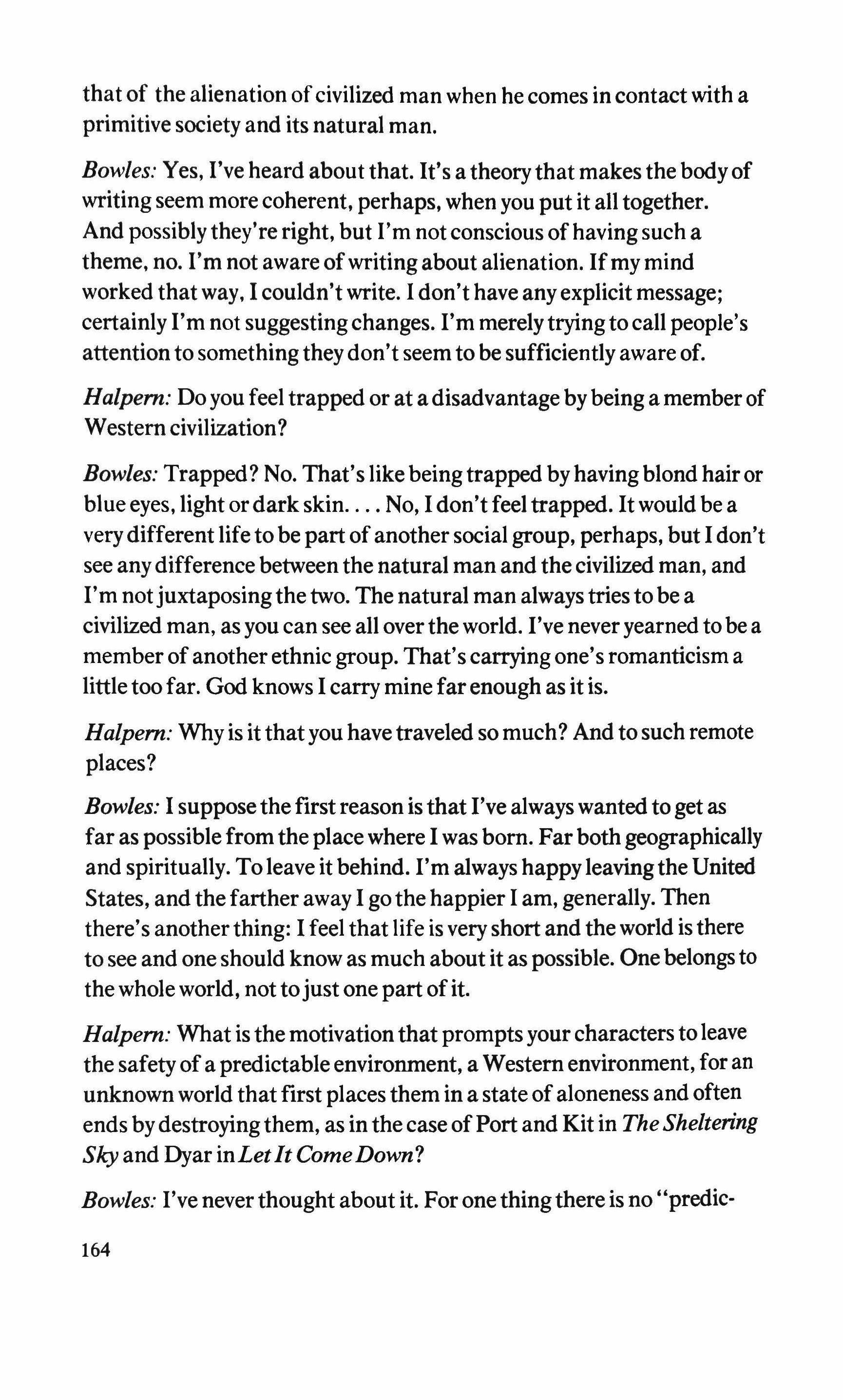
that of the alienation ofcivilized man when he comes in contact with a primitivesociety and its natural man.
Bowles: Yes, I've heard about that. It's a theorythat makes the bodyof writing seem more coherent, perhaps, when you put it all together. And possiblythey'reright, but I'm not conscious of having such a theme, no. I'm not aware ofwriting about alienation. Ifmy mind worked that way, I couldn't write. I don't have any explicit message; certainly I'm not suggestingchanges. I'm merelytrying to call people's attention to somethingthey don't seem to be sufficiently aware of.
Halpern: Do you feel trapped or at a disadvantagebybeing a member of Western civilization?
Bowles: Trapped? No. That's like beingtrapped byhavingblond hair or blue eyes, light or dark skin No, I don't feel trapped. It would be a verydifferent life to be part ofanother social group, perhaps, but I don't see any difference between the natural man and the civilized man, and I'm not juxtaposingthe two. The natural man always tries to be a civilized man, as you can see all over the world. I've never yearned to be a member ofanother ethnic group. That's carrying one's romanticism a little too far. God knows I carry mine farenough as it is.
Halpern: Why is it that you have traveled so much? And to such remote places?
Bowles: I supposethe first reason is that I've always wanted to get as far as possiblefrom the place where I was born. Far both geographically and spiritually. Toleave it behind. I'm alwayshappyleavingthe United States, and the farther away I go the happier I am, generally. Then there's another thing: I feel that life is veryshort and the world is there to see and one should know as much about it as possible. One belongs to the whole world, not tojust one part ofit.
Halpern: What is the motivationthat prompts your characters to leave the safety of a predictableenvironment, a Western environment, for an unknown world that first places them in a state of aloneness and often ends bydestroyingthem, as in the case ofPort and Kit in TheSheltering Sky and Dyar inLetIt ComeDown?
Bowles: I've never thought about it. For one thingthere is no "predic-
164
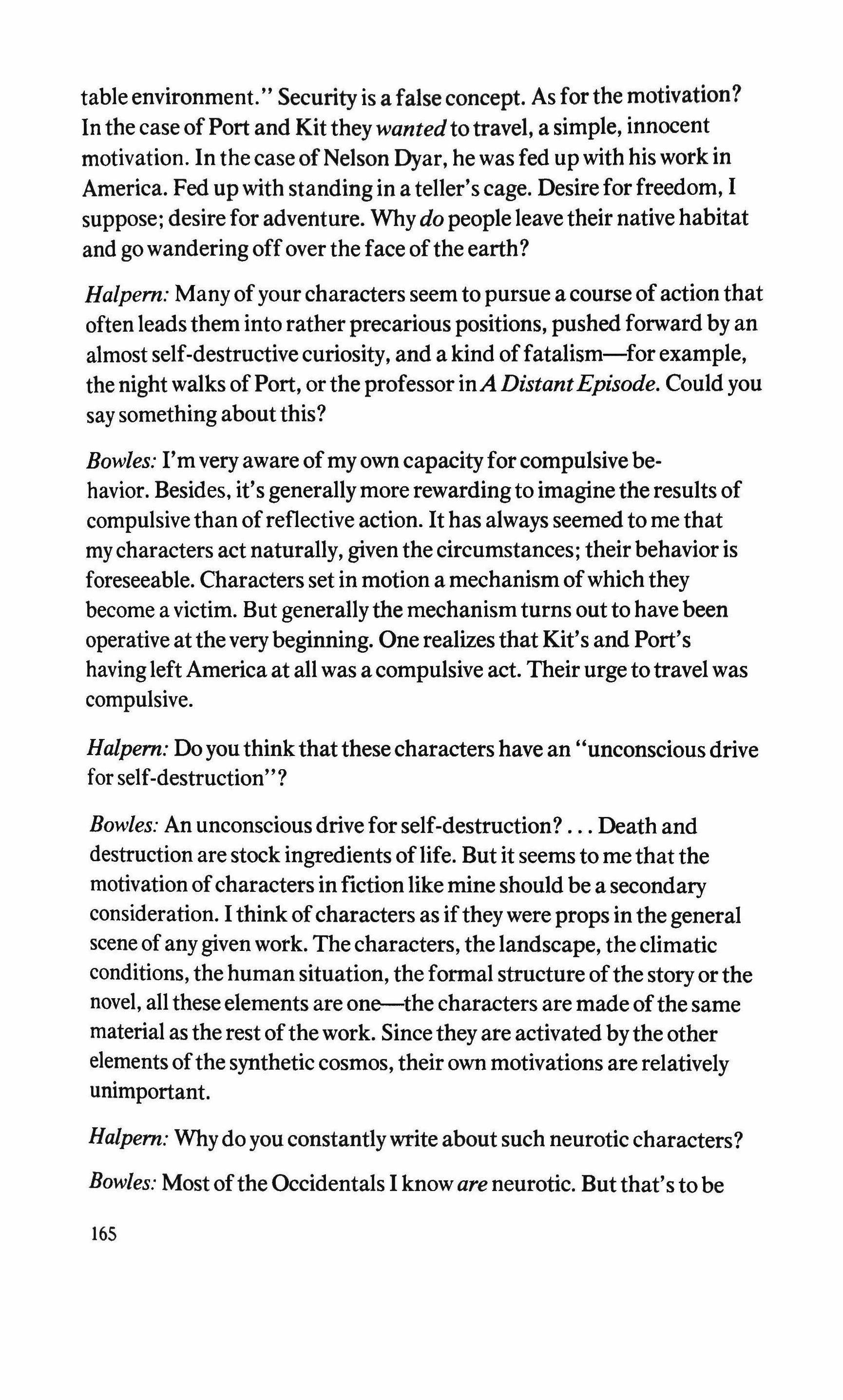
table environment." Security is a false concept. As forthe motivation? In the case ofPort and Kit theywantedto travel, a simple, innocent motivation. In the case ofNelson Dyar, he was fed up with his work in America. Fed up with standing in a teller's cage. Desire for freedom, I suppose; desire for adventure. Why do people leavetheir native habitat and gowandering off over the face ofthe earth?
Halpern: Many ofyour characters seem to pursue a course ofaction that often leads them into rather precariouspositions, pushed forward by an almost self-destructive curiosity, and a kind offatalism-for example, the night walks ofPort, or the professor inA DistantEpisode. Could you say something about this?
Bowles: I'm very aware ofmy own capacityforcompulsive behavior. Besides. it's generally more rewarding to imagine the results of compulsivethan ofreflective action. It has always seemed to me that my characters act naturally, given the circumstances; theirbehavior is foreseeable. Characters set in motion a mechanism ofwhich they become a victim. But generallythe mechanism turns out to have been operative at the very beginning. One realizes that Kit's and Port's havingleft America at all was a compulsive act. Their urge to travel was compulsive.
Halpern: Do you thinkthatthesecharacters have an "unconscious drive for self-destruction"?
Bowles: An unconscious drive for self-destruction? Death and destruction are stock ingredients oflife. But it seems to me that the motivation ofcharacters infiction like mine should be a secondary consideration. I think ofcharacters as ifthey were props in the general scene of any given work. The characters, the landscape, the climatic conditions, the human situation, the formal structure ofthe story or the novel, all these elements are one--the characters are made ofthe same material as the rest ofthe work. Since they are activated bythe other elements ofthe synthetic cosmos, their own motivations are relatively unimportant.
Halpern: Why do you constantlywrite about such neurotic characters? Bowles: Most ofthe Occidentals I know are neurotic. But that's to be
165
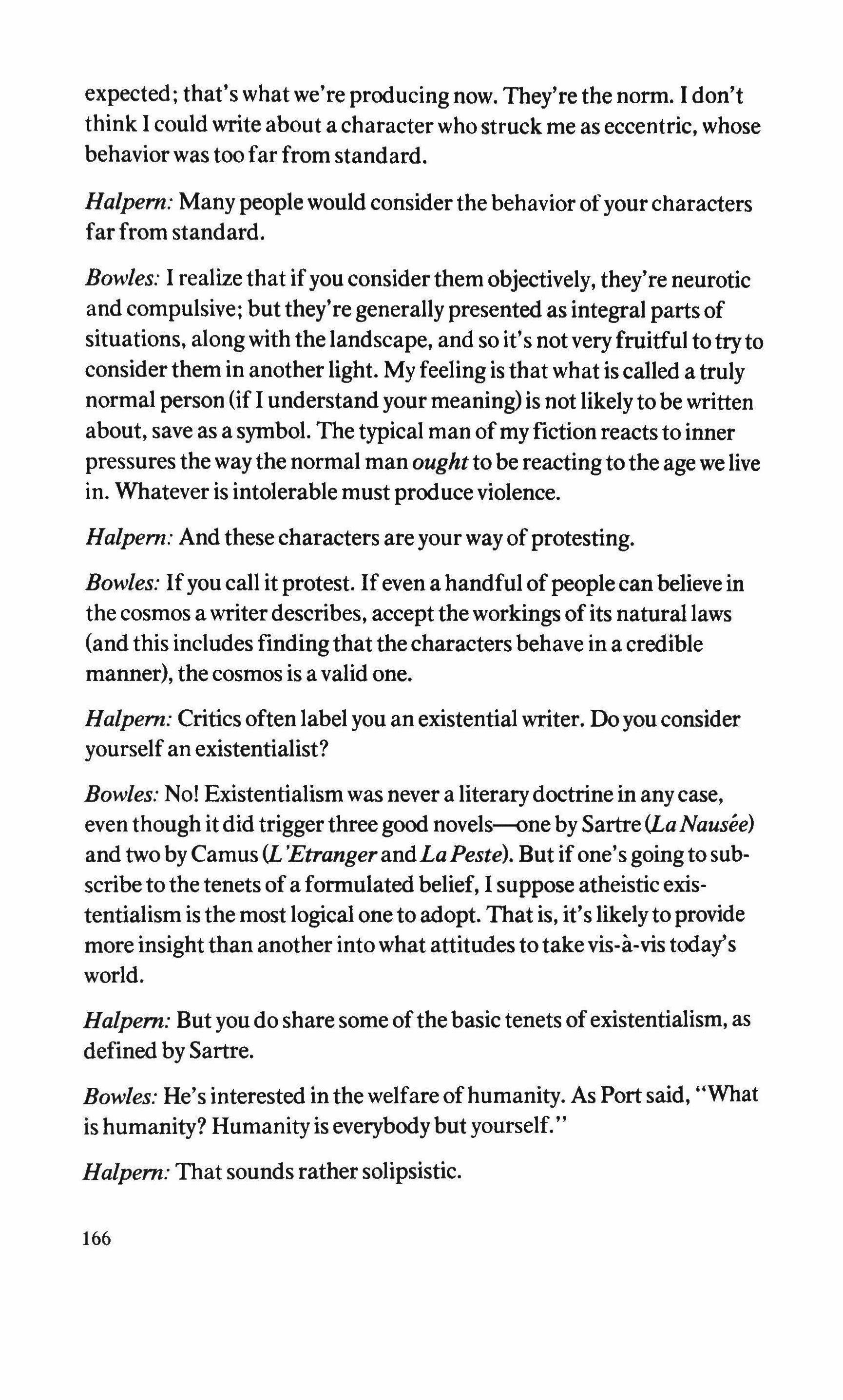
expected; that's what we're producing now. They're the norm. I don't think I could write about a character who struck me as eccentric, whose behavior was too far from standard.
Halpern: Manypeople would consider the behavior ofyour characters far from standard.
Bowles: I realize that ifyou considerthem objectively, they're neurotic and compulsive; but they'regenerallypresented as integral parts of situations, alongwith the landscape, and so it's not very fruitful totryto considerthem in another light. Myfeeling is that what is called a truly normal person (if I understand your meaning) is not likely to be written about, save as a symbol. The typical man ofmyfiction reacts to inner pressures the way the normal man ought to be reactingto the age we live in. Whatever is intolerable must produce violence.
Halpern: And these characters are your way ofprotesting.
Bowles: Ifyou call it protest. If even a handful ofpeople can believe in the cosmos a writer describes, accept theworkings ofits natural laws (and this includes findingthat the characters behave in a credible manner), the cosmos is a valid one.
Halpern: Critics often label you an existential writer. Doyou consider yourself an existentialist?
Bowles: No! Existentialism was never a literarydoctrine in any case, even though it did trigger three good novels-one by Sartre (LaNausee) and two by Camus (L'EtrangerandLaPeste). But ifone's going to subscribe to the tenets of a formulated belief, I suppose atheistic existentialism is the most logical one to adopt. That is, it's likelyto provide more insight than another intowhat attitudes to take vis-it-vis today's world.
Halpern: But you do share some ofthebasic tenets ofexistentialism, as defined by Sartre.
Bowles: He's interested in the welfare ofhumanity. As Port said, "What is humanity? Humanity is everybodybut yourself."
Halpern: That sounds rather solipsistic.
166
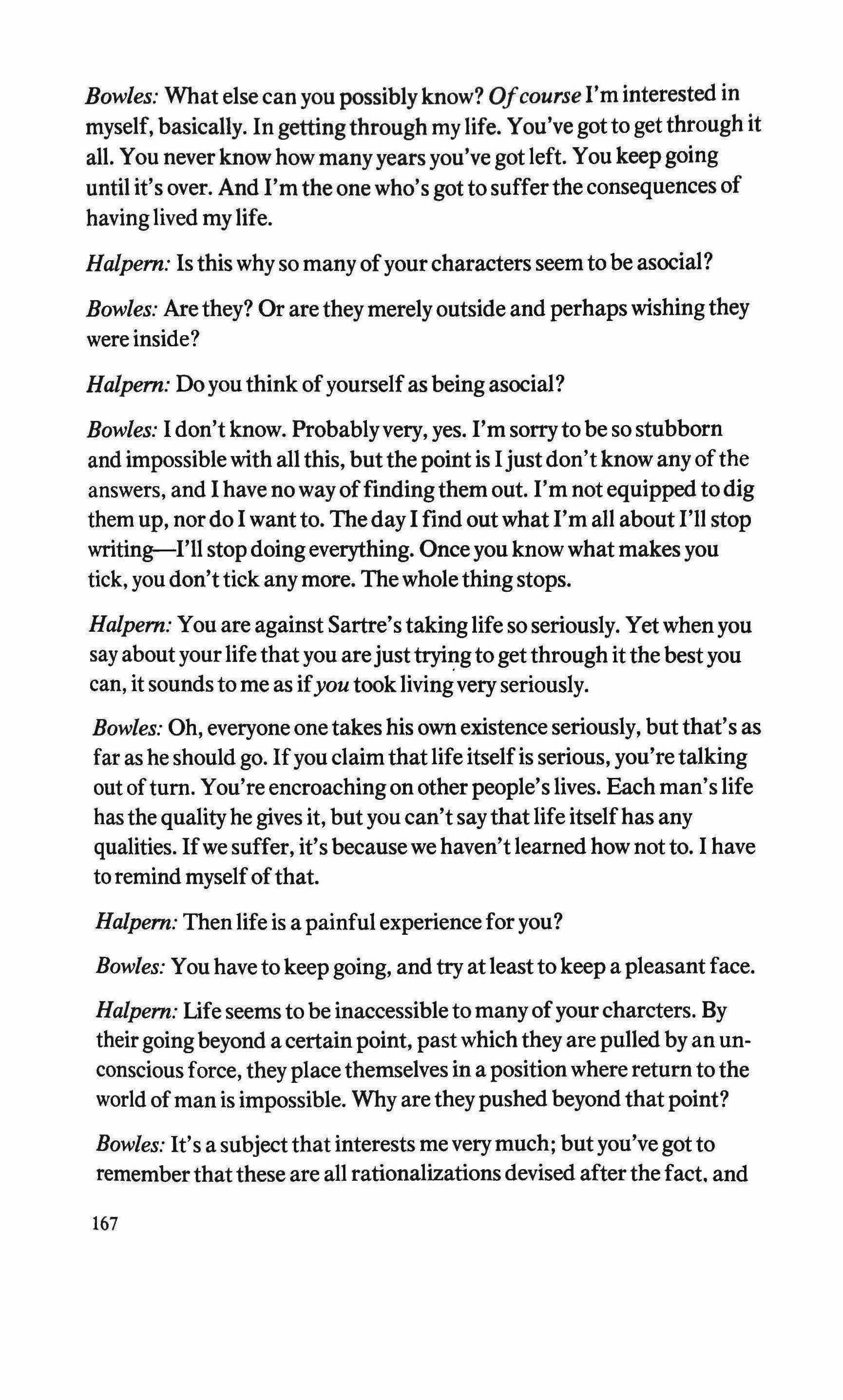
Bowles: What else can you possibly know? Ofcourse I'm interested in myself, basically. In gettingthrough my life. You've got to getthrough it all. You never know how manyyears you've got left. You keepgoing until it's over. And I'm the one who's got to sufferthe consequences of having lived my life.
Halpern: Is this why so many ofyour characters seem to be asocial?
Bowles: Are they? Or are theymerely outside and perhapswishingthey were inside?
Halpern: Doyou think ofyourself as being asocial?
Bowles: I don't know. Probablyvery, yes. I'm sorryto be so stubborn and impossiblewith all this, butthe pointis Ijustdon'tknow any ofthe answers, and I have no way offinding them out. I'm not equipped to dig them up, nor do I want to. Theday I find out what I'm all about I'll stop writing-I'll stopdoingeverything. Once you knowwhat makes you tick, you don'ttick any more. The wholethingstops.
Halpern: You are against Sartre's taking life so seriously. Yet when you say about your life that you are justtrying to getthrough it the best you can, it sounds to me as ifyou took livingvery seriously.
Bowles: Oh, everyone one takes his own existence seriously, but that's as far as he should go. Ifyou claimthatlife itselfis serious, you'retalking out ofturn. You're encroaching on other people's lives. Each man's life has the quality he gives it, but you can't say that life itselfhas any qualities. If we suffer, it's because we haven't learned how not to. I have to remind myselfofthat.
Halpern: Thenlife is a painfulexperience foryou?
Bowles: You have to keepgoing, and try at least to keep a pleasant face.
Halpern: Life seems to be inaccessible to many ofyourcharcters. By their goingbeyond a certain point, past which they are pulledby an unconscious force, theyplace themselves in a position where return to the world of man is impossible. Why are theypushed beyond that point?
Bowles: It's a subjectthat interests me very much; butyou'vegot to remember that these are all rationalizations devised after the fact. and
167
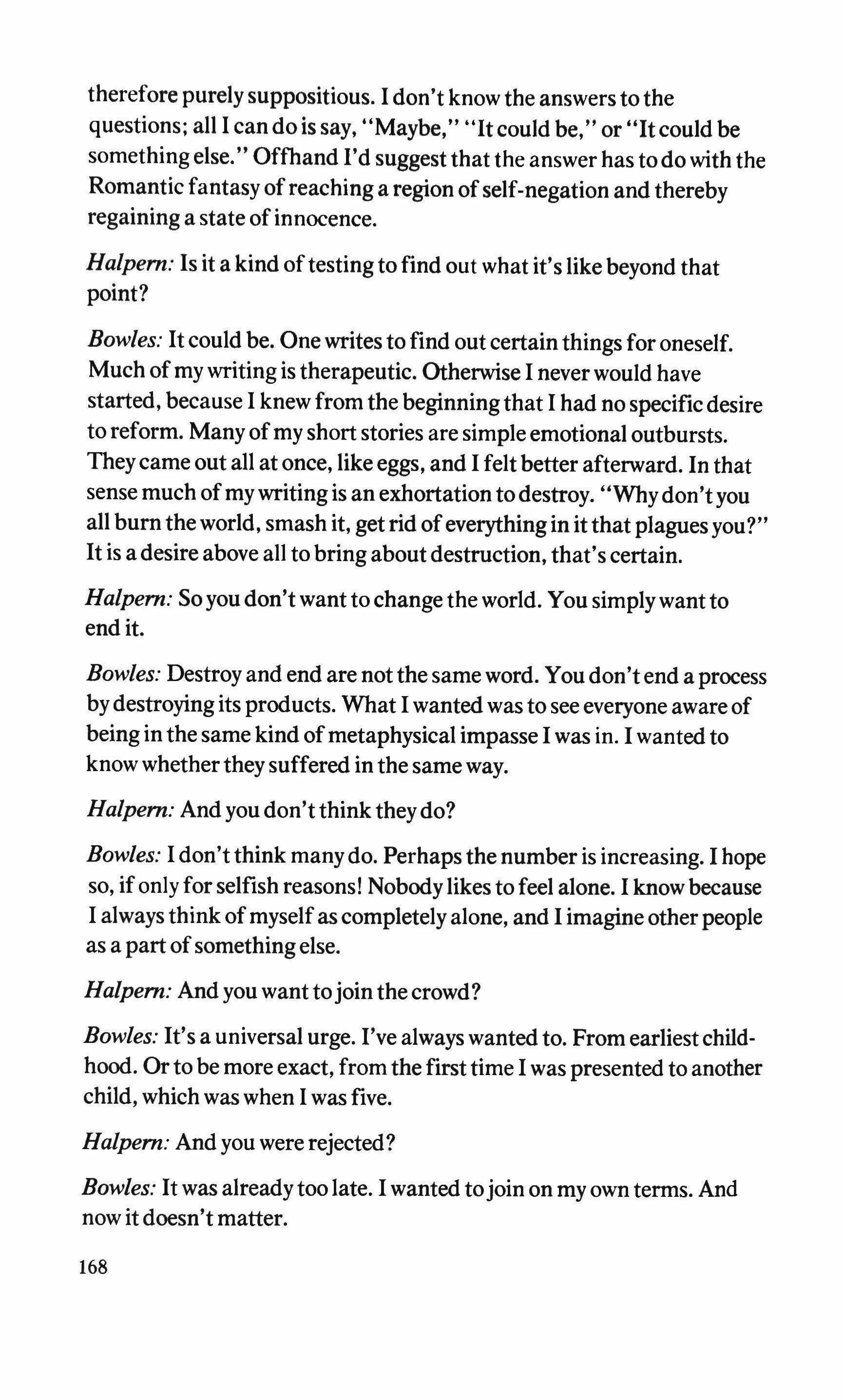
therefore purelysuppositious. I don't know the answers to the questions; all I can do is say, "Maybe," "It could be," or "Itcould be something else." Offhand I'd suggest that the answer has to do with the Romantic fantasy ofreaching a region ofself-negation and thereby regaining a state of innocence.
Halpern: Is it a kind oftesting to find out what it's like beyond that point?
Bowles: It could be. One writes to find out certain things for oneself. Much ofmy writing is therapeutic. Otherwise I never would have started, because I knew from the beginningthat I had no specific desire to reform. Manyofmy short stories are simple emotional outbursts. They came out all at once, like eggs, and I felt better afterward. In that sense much of my writingis an exhortation to destroy. "Whydon't you all burn the world, smash it, get rid ofeverything in itthat plaguesyou?" It is a desire above all to bring about destruction, that's certain.
Halpern: So you don't want to change the world. You simplywant to end it.
Bowles: Destroy and end are not the same word. You don'tend a process bydestroying its products. What I wanted was to see everyone aware of being in the same kind ofmetaphysical impasse I was in. I wanted to know whethertheysuffered in the same way.
Halpern: And you don'tthink theydo?
Bowles: I don't think many do. Perhaps the number is increasing. I hope so, if only for selfish reasons! Nobody likes to feel alone. I know because I always think ofmyself as completelyalone, and I imagine otherpeople as a part of something else.
Halpern: And you wanttojoin the crowd?
Bowles: It's a universal urge. I've always wanted to. From earliest childhood. Or to be more exact, from the firsttime I was presented to another child, which was when I was five.
Ha/pern: And you were rejected?
Bowles: It was already too late. I wanted tojoin on my own terms. And now it doesn't matter.
168

Halpern: And so now you alienateyour characters, the wayyou were alienated?
Bowles: I don'tthink thejudge would allowthat question. Life is much harder if one is alone. Shared suffering is easierto bear.
Halpern: Sartre says somewhere that a man's essential freedom is the capacityto say "No." This is something yourcharacters are often incapable of. Dothey achieve any kind offreedom?
Bowles: Mycharacters don't attain any kind offreedom, as far as I'm aware.
Halpern: Is death any kind offreedom?
Bowles: Death? Another nonexistent, somethingto use as a threat to thosewho are afraid ofit. There's nothing to say aboutdeath. The cage door's always open. Nobody has to stay in here. But people want freedom insidethe cage. Sowhat is freedom? You're bound byphysical laws, bound byyour body, bound byyour mind.
Halpern: What does freedom mean to you?
Bowles: I'd say it was not havingto experiencewhat you don't like.
Halpern: Bythe alienation that yourcharacters gothrough in their various exotic settings, are theyforced into consideringthe meaning of theirlives, ifthere is meaning to life?
Bowles: I shouldn'tthink so. In any case, there's not one meaningto life. There should be as many meanings as there are individuals-youassign meaningto life. Ifyou don't assignit, thenclearlyit has none whatever.
Halpern: InL 'Etranger, Meursault is put injail, which is a way ofbeing alienated, and at that point he considers "the meaningoflife."
Bowles: Camus was a greatmoralist, which means, nowadays, to be preoccupied with social considerations. I'm not preoccupied in that way. I'm not a moralist. After all, he was a serious communist; I was a very unserious one, a completelynegative one.
Halpern: What was it about communism that appealed to you?
169
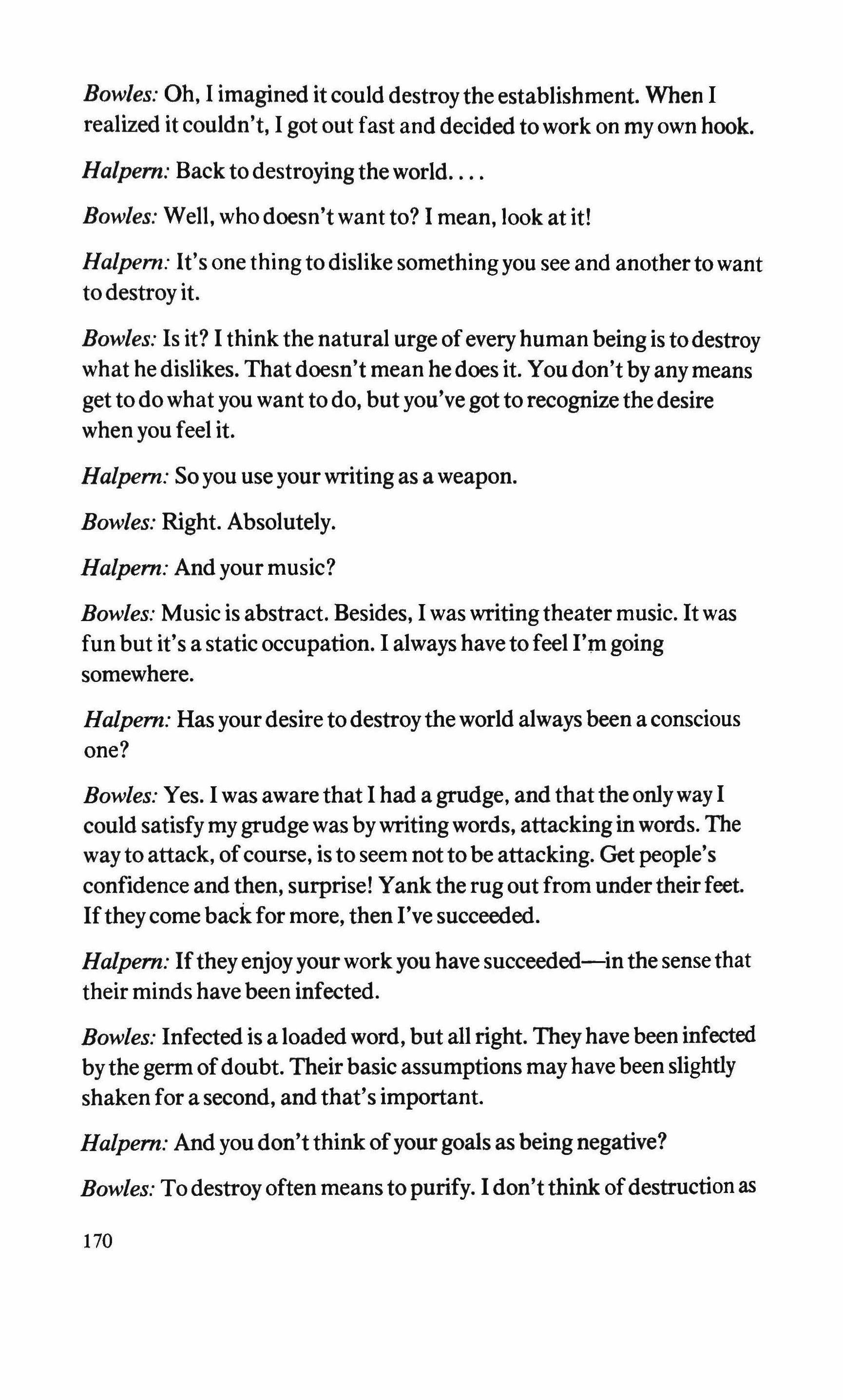
Bowles: Oh, I imagined it could destroythe establishment. When I realized it couldn't, I got out fast and decided to work on my own hook.
Halpern: Back to destroying the world
Bowles: Well, who doesn't wantto? I mean, look at it!
Halpern: It's one thing to dislike something you see and another to want to destroy it.
Bowles: Is it? I think the natural urge ofevery human being is todestroy what he dislikes. That doesn't mean hedoes it. You don't by any means get to dowhat you want to do, butyou'vegot to recognize thedesire when you feel it.
Halpern: So you use your writing as a weapon.
Bowles: Right. Absolutely.
Halpern: And your music?
Bowles: Music is abstract. Besides, I was writingtheater music. It was fun but it's a static occupation. I always have to feel I'mgoing somewhere.
Halpern: Has yourdesire to destroytheworld always been a conscious one?
Bowles: Yes. I was aware that I had a grudge, and that the onlyway I could satisfy my grudge was bywritingwords, attacking in words. The way to attack, ofcourse, is to seem not to be attacking. Get people's confidence and then, surprise! Yankthe rug out from undertheirfeet. Ifthey come backfor more, then I've succeeded.
Halpern: Iftheyenjoyyour workyou have succeeded-in the sense that their minds have been infected.
Bowles: Infected is a loaded word, but all right. They have been infected bythe germ ofdoubt. Theirbasic assumptions may have been slightly shaken for a second, and that's important.
Halpern: And you don'tthink ofyour goals as beingnegative?
Bowles: Todestroy often means to purify. I don'tthink ofdestruction as
170
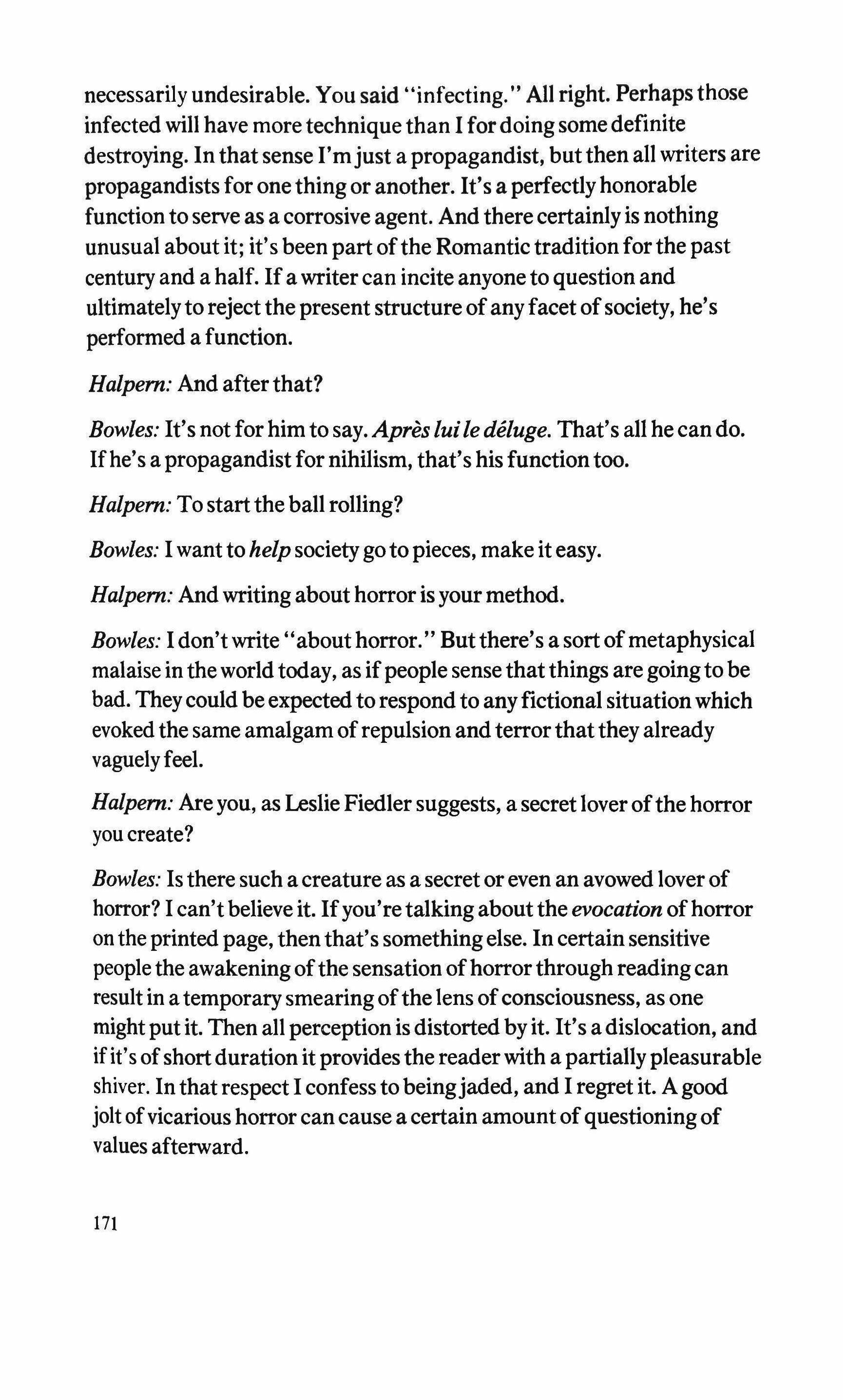
necessarily undesirable. You said "infecting." All right. Perhaps those infected will have more technique than I fordoing some definite destroying. In that sense I'mjust a propagandist, butthen all writers are propagandists for one thing or another. It's a perfectlyhonorable function to serve as a corrosive agent. And there certainly is nothing unusual about it; it's been part ofthe Romantic tradition forthe past century and a half. If a writer can incite anyone to question and ultimatelyto reject the present structure ofany facet ofsociety, he's performed a function.
Halpern: And afterthat?
Bowles: It's not for him to say. Apres luiledeluge. That's all he can do. Ifhe's a propagandist for nihilism, that's his function too.
Halpern: To start the ball rolling?
Bowles: I want to helpsociety goto pieces, make it easy.
Halpern: And writing about horror isyour method.
Bowles: I don't write" about horror." But there's a sort ofmetaphysical malaise in theworld today, as ifpeople sense that things are goingto be bad. Theycould beexpected to respond to anyfictional situationwhich evoked the same amalgam ofrepulsion and terror thattheyalready vaguelyfeel.
Halpern: Are you, as Leslie Fiedler suggests, a secret loverofthe horror you create?
Bowles: Is there such a creature as a secret or even an avowed loverof horror? I can'tbelieve it. Ifyou'retalking about the evocation ofhorror on the printed page, thenthat's somethingelse. In certain sensitive people the awakeningofthe sensation ofhorror throughreading can result in a temporary smearing ofthe lens ofconsciousness, as one mightputit. Then all perception is distorted byit. It's a dislocation, and ifit's ofshortduration it provides the readerwith a partiallypleasurable shiver. In that respect I confess to beingjaded, and I regret it. Agood jolt ofvicarious horror can cause a certain amount ofquestioningof values afterward.
171
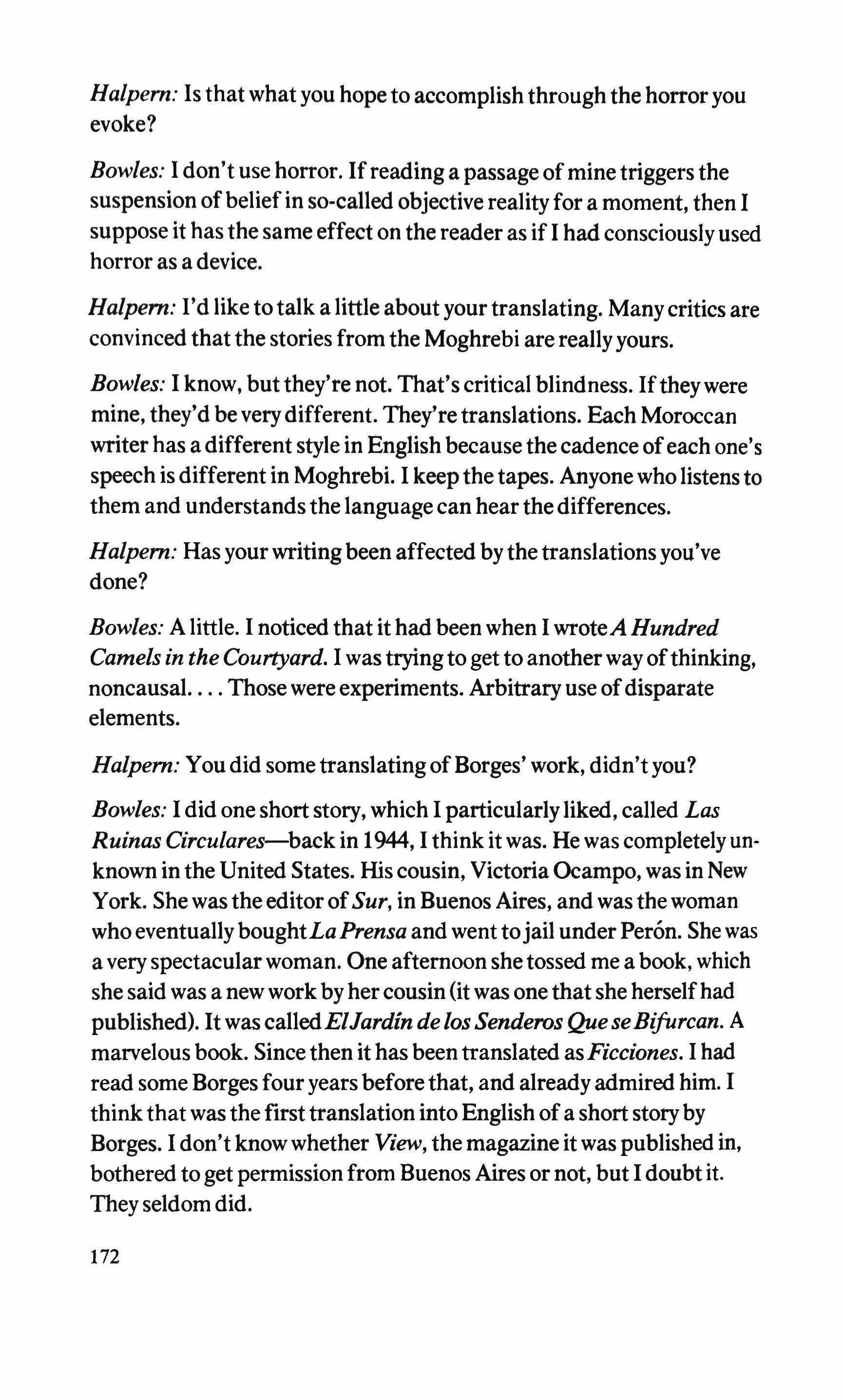
Halpern: Is that what you hope to accomplishthrough the horroryou evoke?
Bowles: I don't use horror. Ifreading a passage ofmine triggers the suspension ofbeliefin so-called objectivereality for a moment, then I suppose it has the same effect on the reader as if I had consciously used horror as a device.
Halpern: I'd like to talk a little about your translating. Manycritics are convinced that the stories from the Moghrebi are reallyyours.
Bowles: I know, butthey're not. That's critical blindness. Ifthey were mine, they'd beverydifferent. They'retranslations. Each Moroccan writer has a different style in English because the cadence ofeach one's speech is different in Moghrebi. I keepthe tapes. Anyone who listens to them and understands the language can hear thedifferences.
Halpern: Has your writingbeen affected bythe translations you've done?
Bowles: A little. I noticed that it had been when I wroteA Hundred Camels in the Courtyard. I was trying to get to another way ofthinking, noncausal. Those were experiments. Arbitrary use ofdisparate elements.
Halpern: You did some translatingof Borges' work, didn't you?
Bowles: I did one short story, which I particularlyliked, called Las Ruinas Circulares-back in 1944, I think it was. He was completely unknown in the United States. His cousin, Victoria Ocampo, was in New York. She was the editorofSur, in Buenos Aires, and was the woman whoeventuallyboughtLaPrensa and went tojail under Peron. She was a very spectacular woman. One afternoon shetossed me a book, which she said was a new work byhercousin (it was one that she herselfhad published). It was calledElIardin delosSenderos Que seBifurcan. A marvelous book. Since then it has been translated as Ficciones. I had read some Borges four years beforethat, and alreadyadmired him. I thinkthat was the first translation into English of a short storyby Borges. I don't know whether View, the magazine it was published in, bothered to get permission from Buenos Aires or not, but I doubt it. Theyseldom did.
172
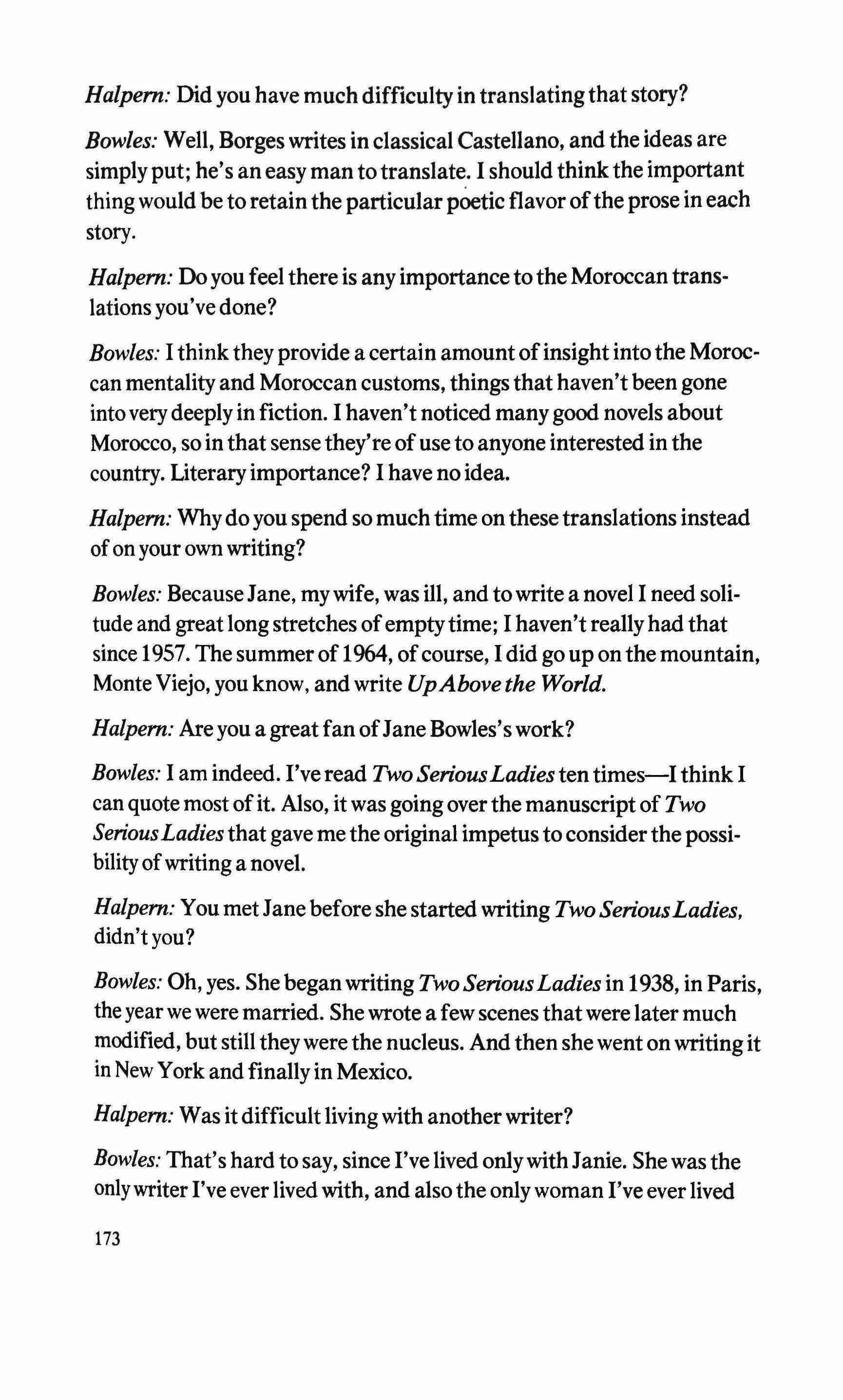
Halpern: Did you have much difficulty in translating that story?
Bowles: Well, Borges writes in classical Castellano, and the ideas are simplyput; he's an easy man to translate. I should thinkthe important thing would be to retain the particularpoetic flavor ofthe prose in each story.
H.alpem: Doyou feel there is any importance to the Moroccan translations you've done?
Bowles: I think theyprovide a certain amount ofinsight intothe Moroccan mentality and Moroccan customs, things that haven'tbeen gone intovery deeply in fiction. I haven't noticed many good novels about Morocco, so in that sense they're of use to anyone interested in the country. Literaryimportance? I have no idea.
Halpern: Whydoyou spend so much time on these translations instead of on your own writing?
Bowles: BecauseJane, mywife, was ill, and towrite a novel I need solitude and greatlong stretches ofemptytime; I haven't really had that since 1957. The summer of 1964, ofcourse, I did go up on the mountain, Monte Viejo, you know, and write UpAbovethe World.
Halpern: Areyou a great fan ofJane Bowles'swork?
Bowles: I am indeed. I've read Two SeriousLadies ten times-I think I can quote most ofit. Also, it was going over the manuscript of Two SeriousLadiesthat gave me the originalimpetus to considerthe possibilityofwriting a novel.
Halpern: You met Jane before she started writing Two SeriousLadies, didn't you?
Bowles: Oh, yes. She beganwriting TwoSeriousLadies in 1938, in Paris, the year we were married. She wrote a few scenes that were latermuch modified, but still they were the nucleus. And then she went on writingit in New York and finallyin Mexico.
Halpern: Was itdifficult livingwith anotherwriter?
Bowles: That's hard to say, since I've lived onlywith Janie. She was the onlywriter I've ever lived with, and alsothe only woman I've ever lived
173
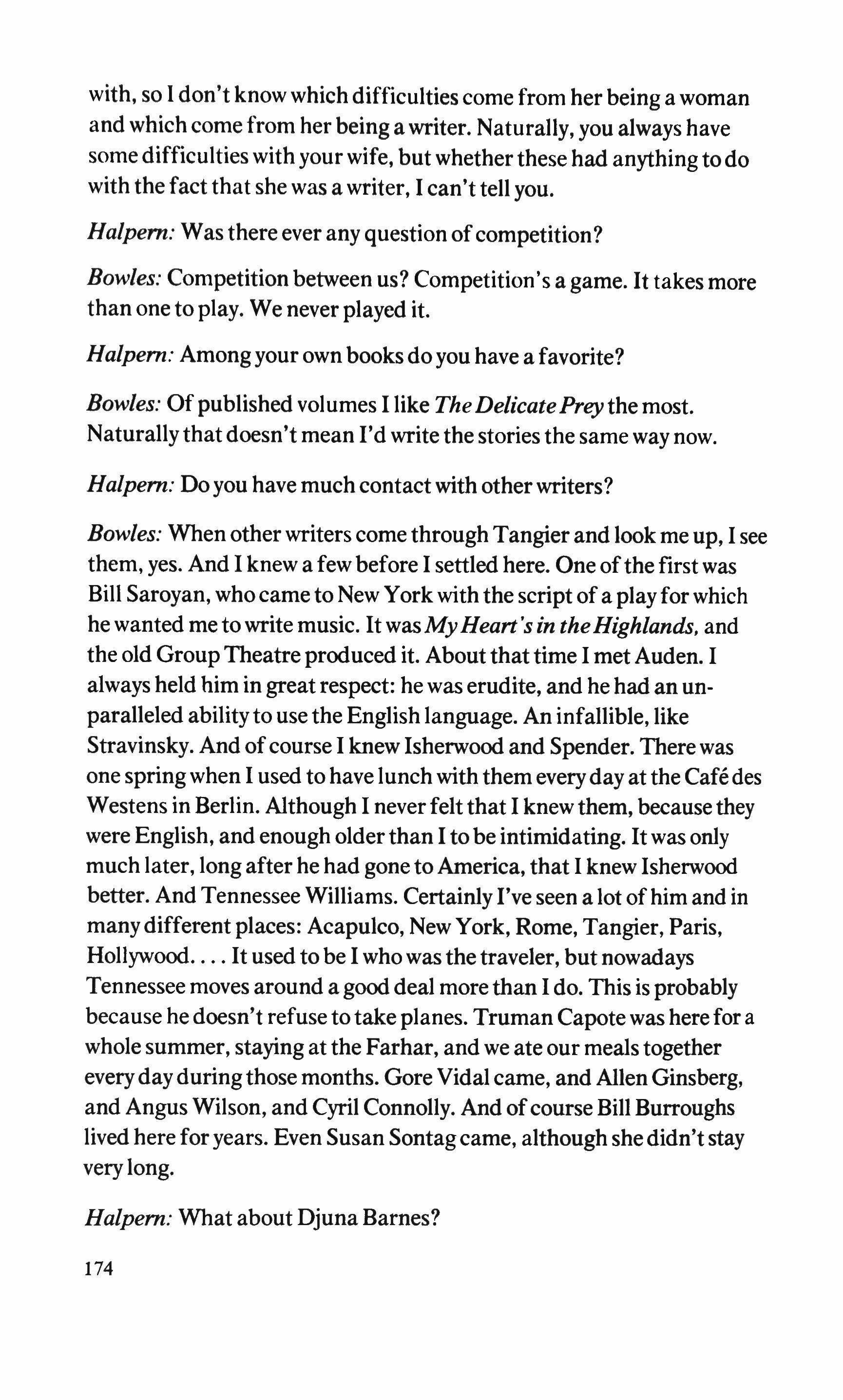
with, so I don't know which difficulties come from her being a woman and which come from her being a writer. Naturally, you always have some difficulties with your wife, but whether these had anything to do with the fact that she was a writer, I can't tell you.
Halpern: Was there ever any question ofcompetition?
Bowles: Competition between us? Competition's a game. It takes more than one to play. We never played it.
Halpern: Amongyour own books do you have a favorite?
Bowles: Of published vol urnes I like TheDelicatePreythe most. Naturally that doesn't mean I'd write the stories the same way now.
Halpern: Doyou have much contact with other writers?
Bowles: When other writers come throughTangier and look me up, I see them, yes. And I knew a few before I settled here. One ofthe first was Bill Saroyan, who came to New York with the script of a playfor which he wanted me to write music. It was MyHeart's in theHighlands. and the old Group Theatre produced it. About that time I met Auden. I always held him in great respect: he was erudite, and he had an unparalleled abilityto use the Englishlanguage. An infallible, like Stravinsky. And of course I knew Isherwood and Spender. There was one springwhen I used to have lunch with them everyday at the Cafe des Westens in Berlin. Although I never felt that I knew them, because they were English, and enough older than I to be intimidating. It was only much later, long after he had gone to America, that I knew Isherwood better. And Tennessee Williams. Certainly I've seen a lot ofhim and in many different places: Acapulco, New York, Rome, Tangier, Paris, Hollywood It used to be I who was the traveler, but nowadays Tennessee moves around a good deal more than I do. This is probably because he doesn't refuse to take planes. Truman Capote was here for a whole summer, staying at the Farhar, and we ate our meals together every dayduring those months. Gore Vidal came, and Allen Ginsberg, and Angus Wilson, and Cyril Connolly. And of course Bill Burroughs lived here foryears. Even Susan Sontag came, although she didn't stay very long.
Halpern: What about Djuna Barnes?
174
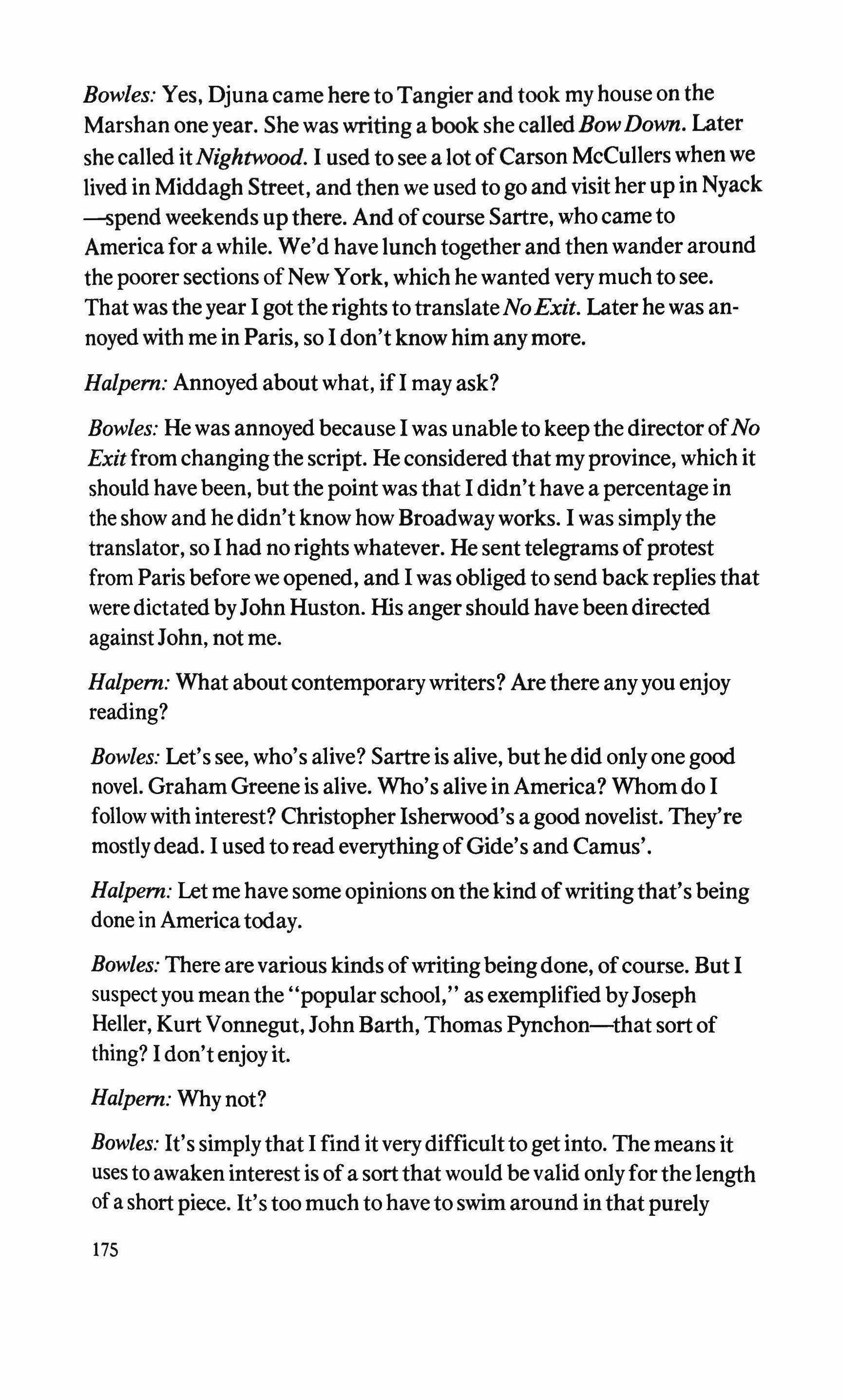
Bowles: Yes, Djuna came here to Tangier and took my house on the Marshan one year. She was writing a book she calledBowDown. Later shecalled itNightwood. I used to see a lot ofCarson McCullers when we lived in Middagh Street, and then we used to go and visit her up in Nyack -spend weekends upthere. And of course Sartre, who came to Americafor a while. We'd have lunch together and then wander around the poorer sections of New York, which he wanted very much to see. That was theyear I gotthe rights to translateNoExit. Later he was annoyed with me in Paris, so I don't know him any more.
Halpern: Annoyed about what, if I may ask?
Bowles: He was annoyed because I was unable to keepthe director ofNo Exit from changingthe script. He consideredthat my province, which it should have been, butthe point was that I didn't have a percentage in the show and he didn't knowhow Broadwayworks. I was simplythe translator, so I had no rights whatever. He sent telegrams ofprotest from Paris before we opened, and I was obliged to send back replies that were dictated byJohn Huston. His anger should have been directed againstJohn, not me.
Halpern: What about contemporarywriters? Are there anyyou enjoy reading?
Bowles: Let's see, who's alive? Sartre is alive, but he did only one good novel. Graham Greene is alive. Who's alive in America? Whomdo I follow with interest? Christopher Isherwood's a good novelist. They're mostlydead. I used to read everything ofGide's and Camus'.
Halpern: Let me have some opinions on the kind ofwritingthat's being done in Americatoday.
Bowles: There are various kinds ofwritingbeingdone, of course. But I suspect you mean the "popular school," as exemplified byJoseph Heller, Kurt Vonnegut, John Barth, Thomas Pynchon-that sort of thing? I don't enjoyit.
Halpern: Why not?
Bowles: It's simplythat I find it very difficultto get into. The means it uses to awaken interest is of a sort that would be valid onlyforthe length of a short piece. It's too much to have to swim around in that purely
175
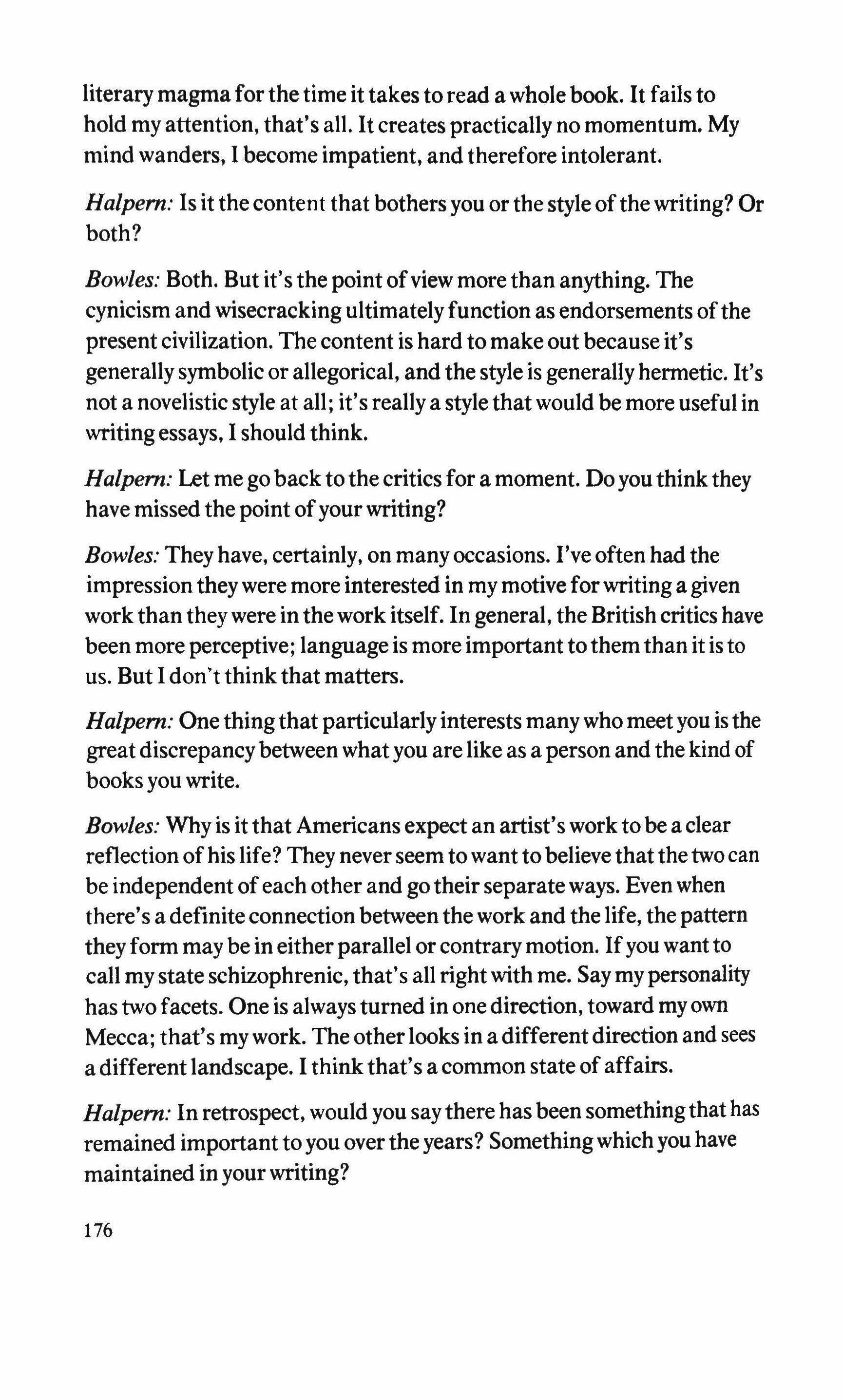
literary magmaforthe time it takes to read a whole book. It fails to hold my attention, that's all. It creates practically no momentum. My mind wanders, I become impatient, and therefore intolerant.
Halpern: Is it the content that bothers you or the style ofthe writing? Or both?
Bowles: Both. But it's the point ofview more than anything. The cynicism and wisecrackingultimately function as endorsements ofthe present civilization. The content is hard to make out because it's generallysymbolic or allegorical, and the style is generallyhermetic. It's not a novelistic style at all; it's really a style that would be more useful in writingessays, I should think.
Halpern: Let me go back to the critics for a moment. Do you think they have missed the point ofyour writing?
Bowles: Theyhave, certainly, on manyoccasions. I've often had the impressionthey were more interested in my motive forwriting a given work than they were in the work itself. In general, the British critics have been more perceptive; language is more important to them than it is to us. But I don't think that matters.
Halpern: One thingthat particularlyinterests manywho meet you isthe greatdiscrepancybetween what you are like as a person and the kind of books you write.
Bowles: Why is it that Americans expect an artist's work to be a clear reflection ofhis life? They never seem to want to believe thatthe two can be independent ofeach other and go their separate ways. Even when there's a definiteconnection betweenthe work and the life, the pattern theyform may be in either parallel or contrary motion. Ifyou wantto call my state schizophrenic, that's all right with me. Say my personality has two facets. One is always turned in one direction, toward my own Mecca; that's my work. The other looks in a differentdirection and sees a different landscape. I thinkthat's a common state ofaffairs.
Halpern: In retrospect, would you say there has been somethingthat has remained important to you over the years? Somethingwhichyou have maintained in your writing?
176
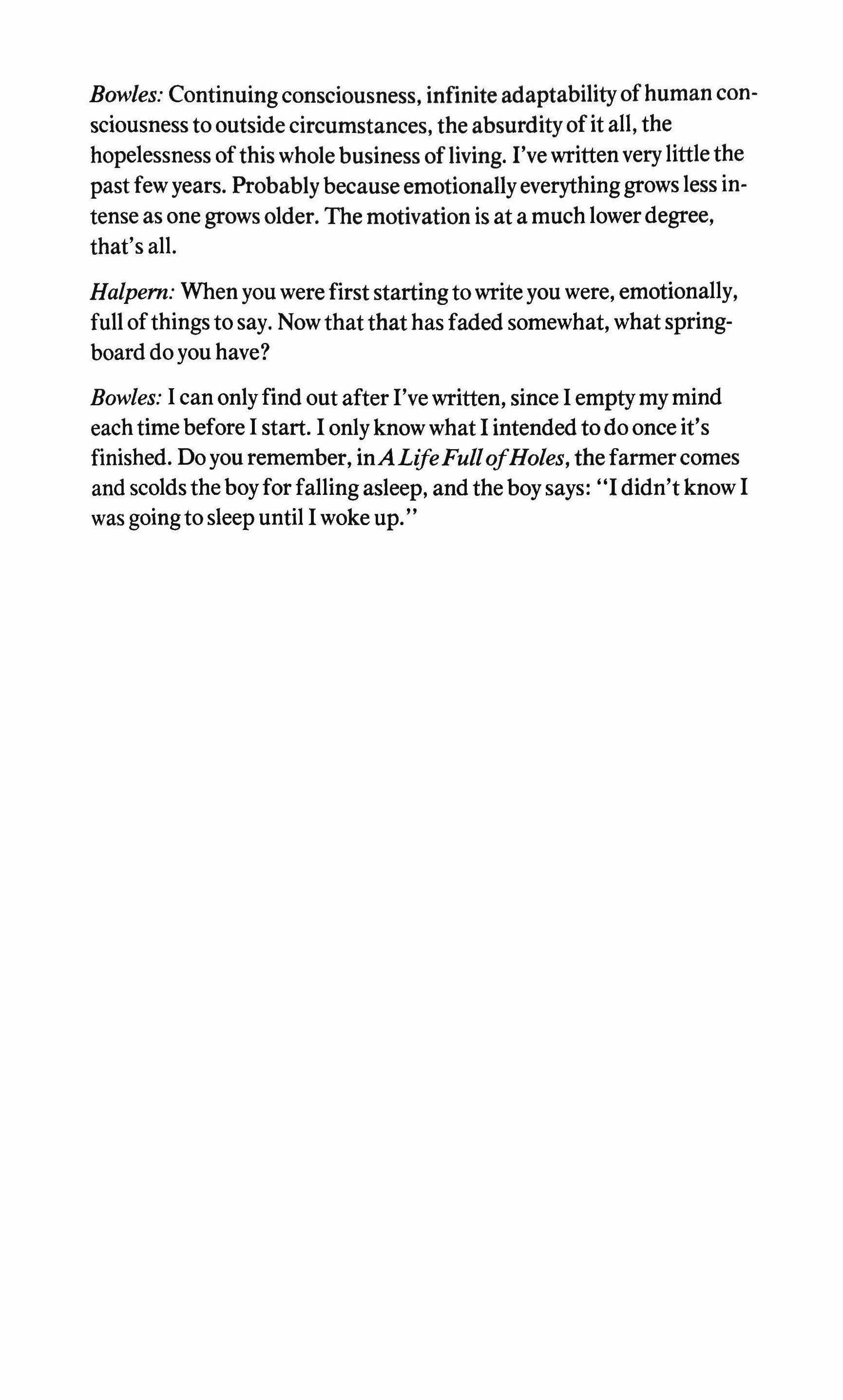
Bowles: Continuingconsciousness, infinite adaptabilityofhuman consciousness to outside circumstances, the absurdityofit all, the hopelessness ofthis whole business ofliving. I've writtenvery little the past few years. Probably because emotionallyeverythinggrows less intense as one grows older. The motivation is at a much lower degree, that's all.
Halpern: When you were first starting to write you were, emotionally, full ofthings to say. Nowthatthat has faded somewhat, what springboard do you have?
Bowles: I can onlyfind out after I've written, since I emptymy mind each time before I start. I only knowwhat 1 intended to do once it's finished. Do you remember, inALifeFullofHoles, thefarmer comes and scoldstheboyfor fallingasleep, and the boy says: "I didn't know 1 was goingto sleep until 1 woke up."
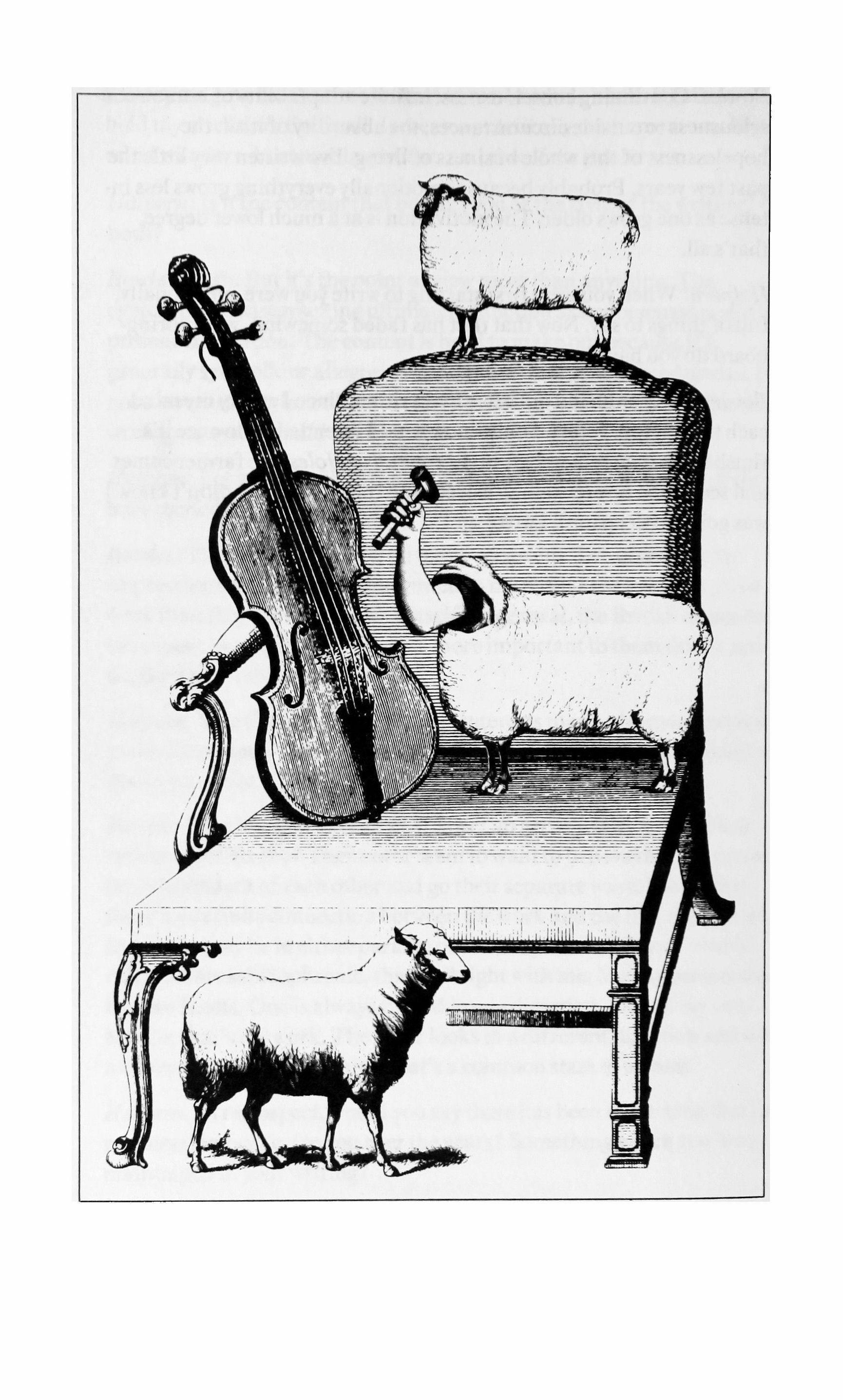
) '.i
Harrison's Row
Alan Sillitoe
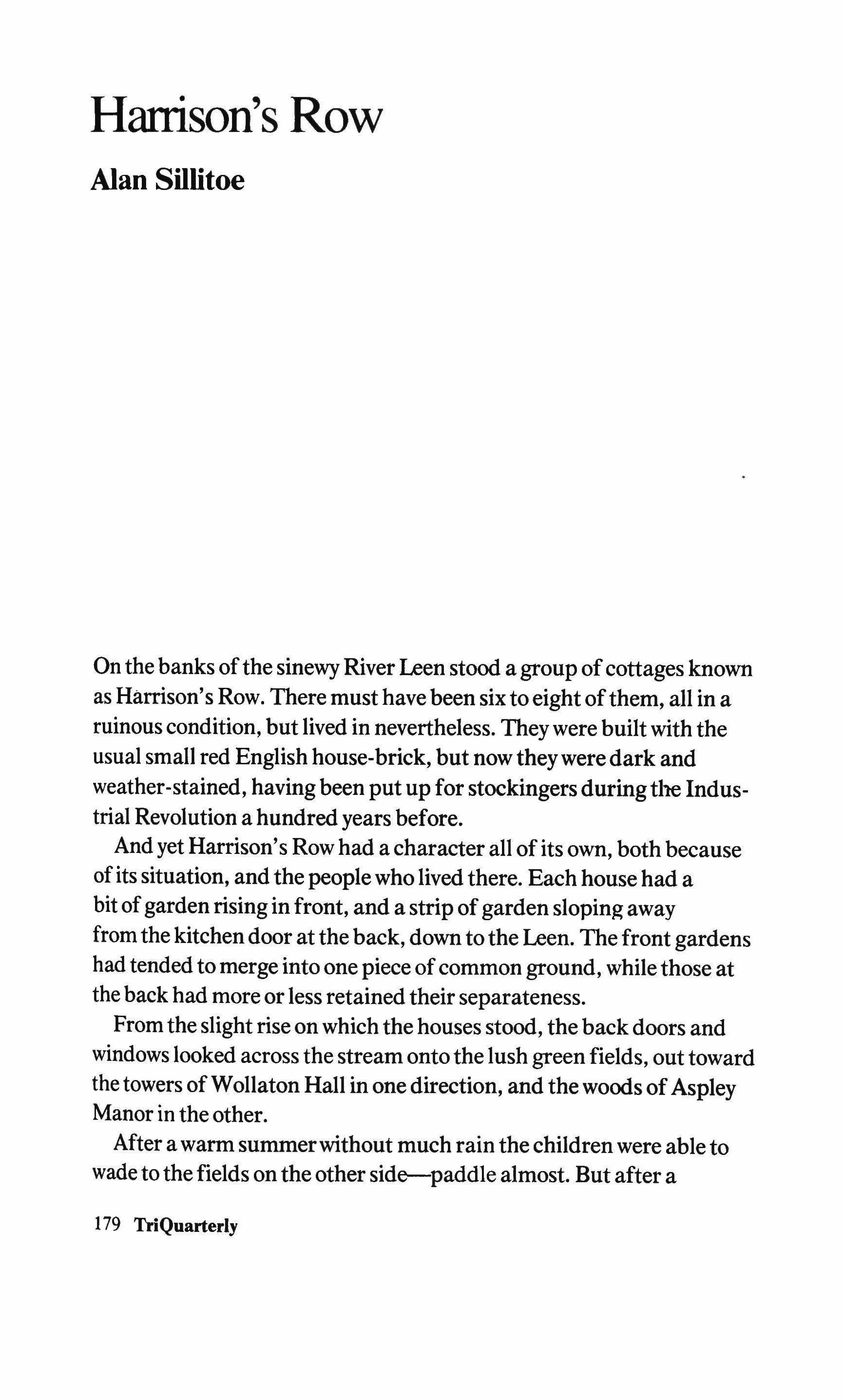
On the banks ofthe sinewy River Leen stood a group ofcottages known as Harrison's Row. There must have been six to eight ofthem, all in a ruinous condition, but lived in nevertheless. They were built with the usual small red English house-brick, but now they were dark and weather-stained, having been put up for stockingersduringthe Industrial Revolution a hundred years before.
And yet Harrison's Row had a character all ofits own, both because of its situation, and the people who lived there. Each house had a bit ofgardenrising in front, and a strip ofgardensloping away fromthe kitchen door at the back, down to the Leen. The front gardens had tended to merge into one piece of common ground, while those at the back had more or less retained their separateness.
From the slight rise on which the houses stood, the back doors and windows looked across the stream onto the lush green fields, out toward the towers ofWollaton Hall in one direction, and the woods ofAspley Manor in the other.
After a warm summerwithout much rain the children were able to wade to thefields on the other side=-paddle almost. But after a
179 TriQuarterly
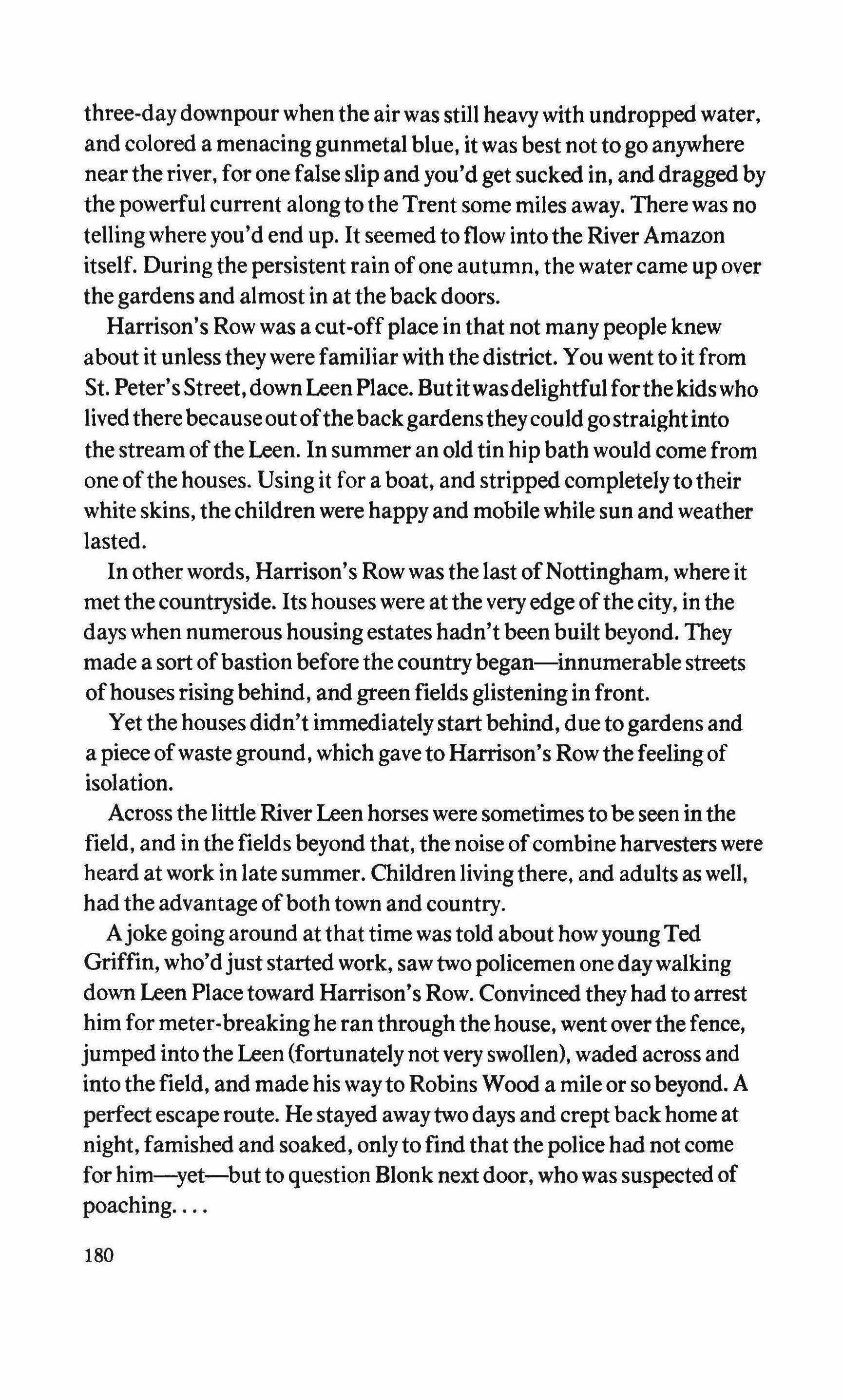
three-daydownpour when the air was still heavy with undropped water, and colored a menacinggunmetal blue, it was best not to go anywhere near the river, for one false slip and you'd get sucked in, and draggedby the powerful current along to the Trent some miles away. There was no tellingwhere you'd end up. It seemed to flow into the River Amazon itself. During the persistent rain of one autumn, the water came up over the gardens and almost in at the back doors.
Harrison's Row was a cut-off place in that not many people knew about it unless they were familiarwith the district. You went to it from St. Peter's Street,down Leen Place. Butit was delightfulforthekidswho livedtherebecause outofthebackgardenstheycouldgostraightinto the stream ofthe Leen. In summer an old tin hip bath would come from one ofthe houses. Using it for a boat, and strippedcompletely to their white skins, the children were happy and mobile while sun and weather lasted.
In otherwords, Harrison's Row was the last ofNottingham, where it met thecountryside. Its houses were at the veryedge ofthe city, in the days when numerous housing estates hadn't been built beyond. They made a sort ofbastion before the countrybegan-innumerable streets ofhouses risingbehind, and green fields glisteningin front.
Yetthe houses didn't immediately start behind, due to gardens and a piece ofwaste ground, which gave to Harrison's Rowthefeelingof isolation.
Across the little River Leen horses were sometimes to be seen inthe field, and in the fields beyond that, the noise ofcombine harvesters were heard at work in late summer. Children livingthere, and adults as well, had the advantage ofboth town and country.
Ajokegoing around at that time was told about howyoung Ted Griffin, who'djust started work, saw two policemen one daywalking down Leen Placetoward Harrison's Row. Convinced they had to arrest him for meter-breakinghe ran through the house, went over the fence, jumped intothe Leen (fortunately not very swollen), waded across and into the field, and made his wayto Robins Wood a mile or so beyond. A perfect escape route. He stayed awaytwo days and crept backhome at night, famished and soaked, only to find that the police had not come for him-yet-but to question BIonk next door, who was suspected of poaching
180
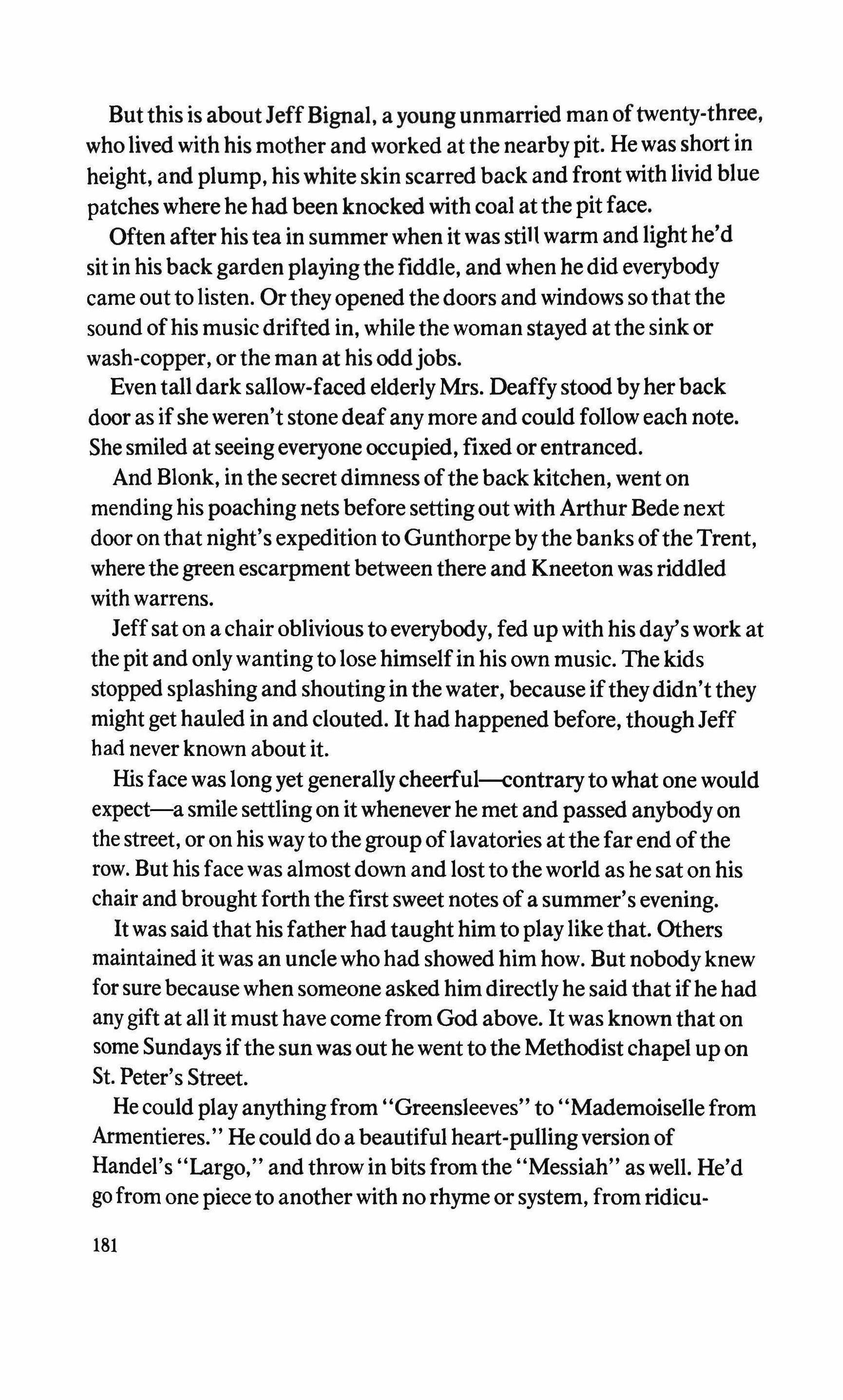
Butthis is about JeffBignal, a young unmarried man oftwenty-three, wholived with his mother and worked at the nearbypit. He was short in height, and plump, hiswhite skin scarred back and front with livid blue patches where he had been knocked with coal at the pit face.
Often after his tea in summer when it was still warm and light he'd sit in his back gardenplayingthe fiddle, and when hedid everybody came out to listen. Ortheyopened the doors and windows so that the sound ofhis music drifted in, while the woman stayed at the sink or wash-copper, or the man at his oddjobs.
Even tall dark sallow-faced elderly Mrs. Deaffy stood byherback door as ifshe weren't stone deaf any more and could follow each note. She smiled at seeing everyone occupied, fixed or entranced.
And Blonk, in the secret dimness ofthe back kitchen, went on mending his poaching nets before setting out with Arthur Bede next door on that night'sexpedition to Gunthorpebythe banks ofthe Trent, where the green escarpment between there and Kneeton was riddled with warrens.
Jeffsat on a chair oblivious to everybody, fed up with his day's work at the pit and onlywanting to lose himselfin his own music. The kids stopped splashing and shouting in the water, because iftheydidn't they might get hauled in and clouted. It had happened before, thoughJeff had never known about it.
His face was longyet generallycheerful--contrary to what one would expect-a smile settling on itwhenever he met and passed anybody on the street, or on his wayto the group of lavatories at the far end ofthe row. But his face was almostdown and lost to theworld as he sat on his chair and brought forth the first sweet notes of a summer's evening.
It was saidthat his father had taught him to play like that. Others maintained it was an uncle who had showed him how. But nobody knew for sure because when someone asked him directly he said that ifhe had any gift at all it must have come from God above. It was known that on some Sundays ifthe sun was out he went to the Methodist chapel up on St. Peter's Street.
He could playanythingfrom "Greensleeves" to "Mademoiselle from Armentieres." He could do a beautiful heart-pulling version of Handel's "Largo," and throw in bits from the "Messiah" as well. He'd go from one piece to another with no rhyme or system, from ridicu-
181
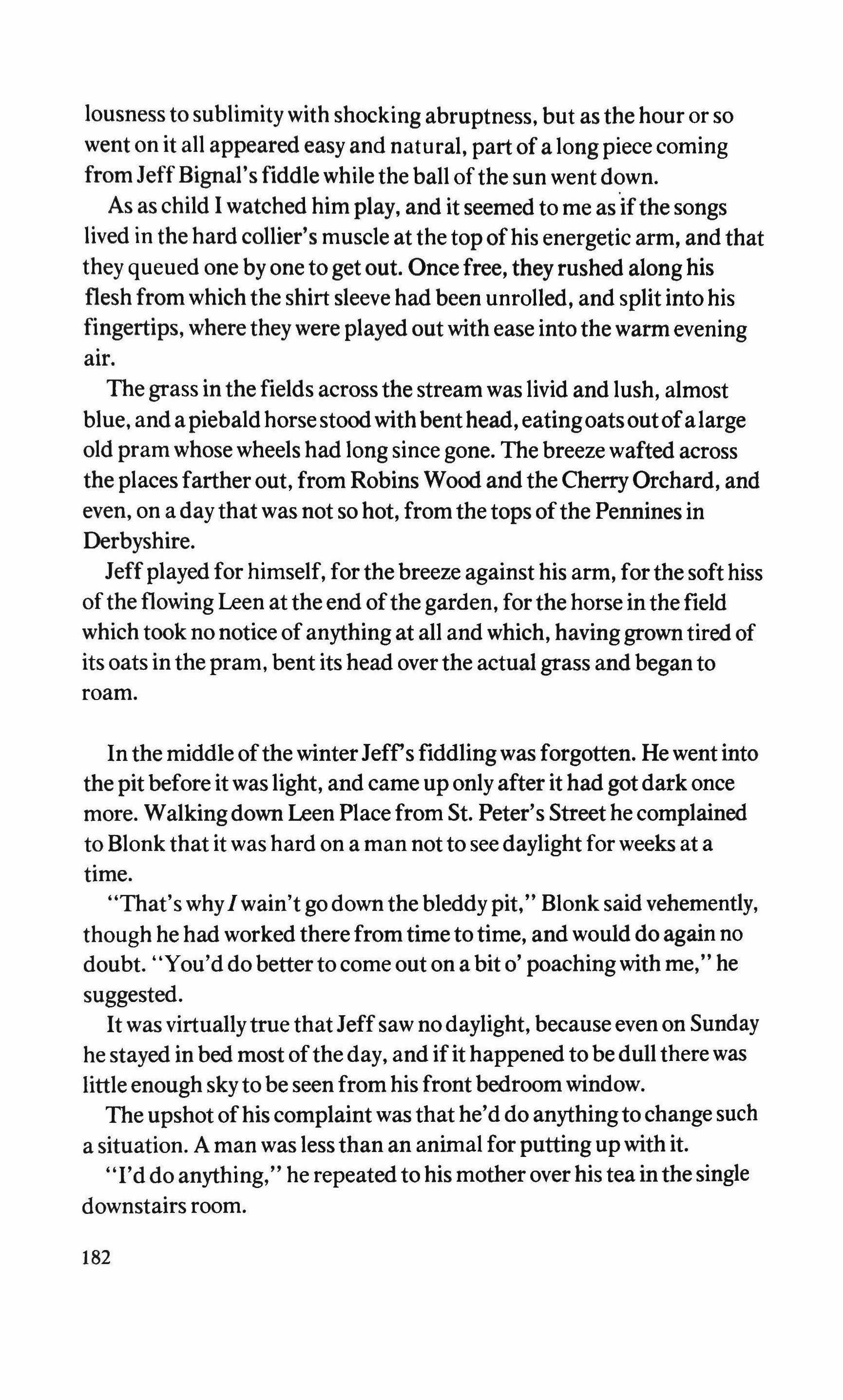
lousness to sublimity with shockingabruptness, but as the hour or so went on it all appeared easy and natural, part of a longpiececoming from JeffBignal's fiddle while the ball ofthe sun went down.
As as child I watched him play, and it seemed to me as 'ifthe songs lived in the hard collier's muscle at the top ofhis energetic arm, and that theyqueued one by one to get out. Once free, they rushed along his flesh from which the shirt sleeve had been unrolled, and split into his fingertips, where they were played out with ease into the warm evening air.
The grass in the fields across the stream was livid and lush, almost blue, and a piebald horsestoodwithbenthead,eatingoatsoutofa large old pram whose wheels had long since gone. The breeze wafted across the places farther out, from Robins Wood and the CherryOrchard, and even, on a daythat was not so hot, from the tops ofthe Pennines in Derbyshire.
Jeffplayed for himself, for the breeze against his arm, forthe soft hiss ofthe flowing Leen at the end ofthe garden, forthe horse inthe field which took no notice ofanything at all and which, havinggrown tired of its oats in the pram, bent its head over the actual grass and began to roam.
In the middle ofthe winterJeffs fiddling was forgotten. He went into the pit before it was light, and came up only after it had got dark once more. Walkingdown Leen Place from St. Peter's Street he complained to Blonk that it was hard on a man not to see daylight for weeks at a time.
"That's whyIwain't go down the bleddypit," Blonk said vehemently, though he had worked there from time to time, and would do again no doubt. "You'd do better to come out on a bit 0' poachingwith me," he suggested.
It was virtually true thatJeff saw no daylight, because even on Sunday he stayed in bed most ofthe day, and ifit happened to be dull there was little enough sky to be seen from his front bedroom window.
The upshot ofhis complaint was that he'd do anythingto change such a situation. A man was lessthan an animal for putting up with it.
"I'd do anything," he repeated to his mother over his tea in the single downstairs room.
182
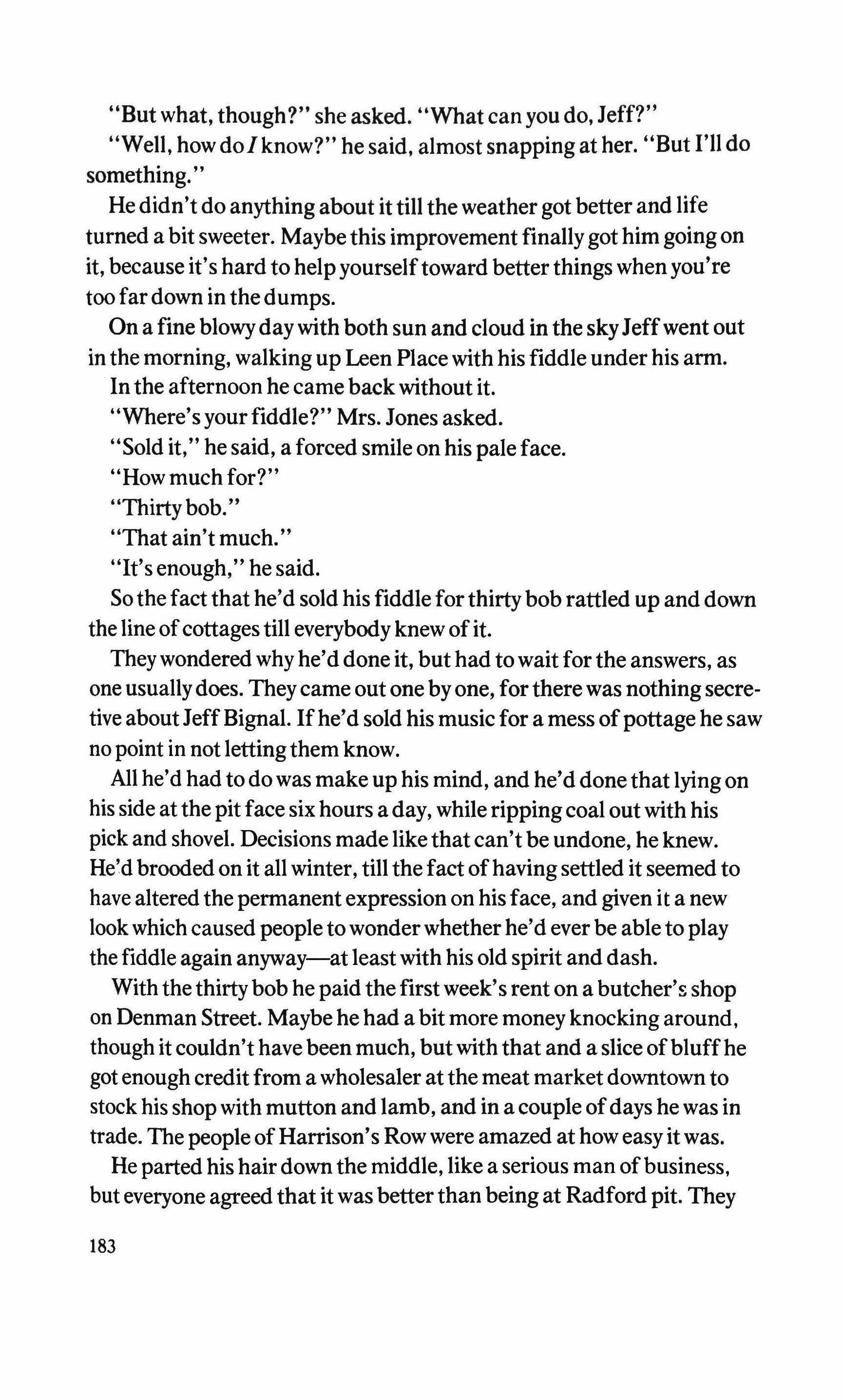
"But what, though?" she asked. "What can you do, Jeff?"
"Well, how dol know?" he said, almost snapping at her. "But I'll do something.
He didn't do anything about it till the weather got better and life turned a bit sweeter. Maybe this improvementfinallygot him going on it, because it's hard to help yourselftoward better things whenyou're too far down in thedumps.
On a fine blowydaywith both sun and cloud in the skyJeffwent out in the morning, walking up Leen Place with his fiddle under his arm.
In the afternoon he came backwithout it.
"Where's yourfiddle?" Mrs. Jones asked.
"Sold it," he said, a forced smile on his pale face.
"How much for?"
"Thirtybob."
"That ain't much."
"It's enough," he said.
So the fact that he'd sold his fiddle for thirty bob rattled up and down the line ofcottagestill everybody knew ofit.
Theywondered whyhe'd done it, but had to wait forthe answers, as one usuallydoes. They came out one by one, forthere was nothing secretive aboutJeffBignal. Ifhe'd sold his music for a mess ofpottage he saw no point in not lettingthem know.
All he'd had to do was make up his mind, and he'd done that lying on his side at the pit face six hours a day, while rippingcoal out with his pick and shovel. Decisions made like that can't be undone, he knew. He'd brooded on it all winter, till the fact ofhavingsettled it seemed to have altered the permanentexpression on his face, and given it a new lookwhich caused people to wonder whether he'd ever be able to play the fiddle again anyway-at least with his old spirit and dash.
With the thirtybob he paid the first week's rent on a butcher's shop on Denman Street. Maybe he had a bit more money knocking around, though itcouldn't have been much, butwith that and a slice ofbluffhe gotenough credit from a wholesaler at the meat market downtown to stock his shop with mutton and lamb, and in a couple ofdays he was in trade. The people of Harrison's Row were amazed at how easyit was.
He parted his hair down the middle, like a serious man ofbusiness, but everyone agreed that it was better than being at Radford pit. They
183
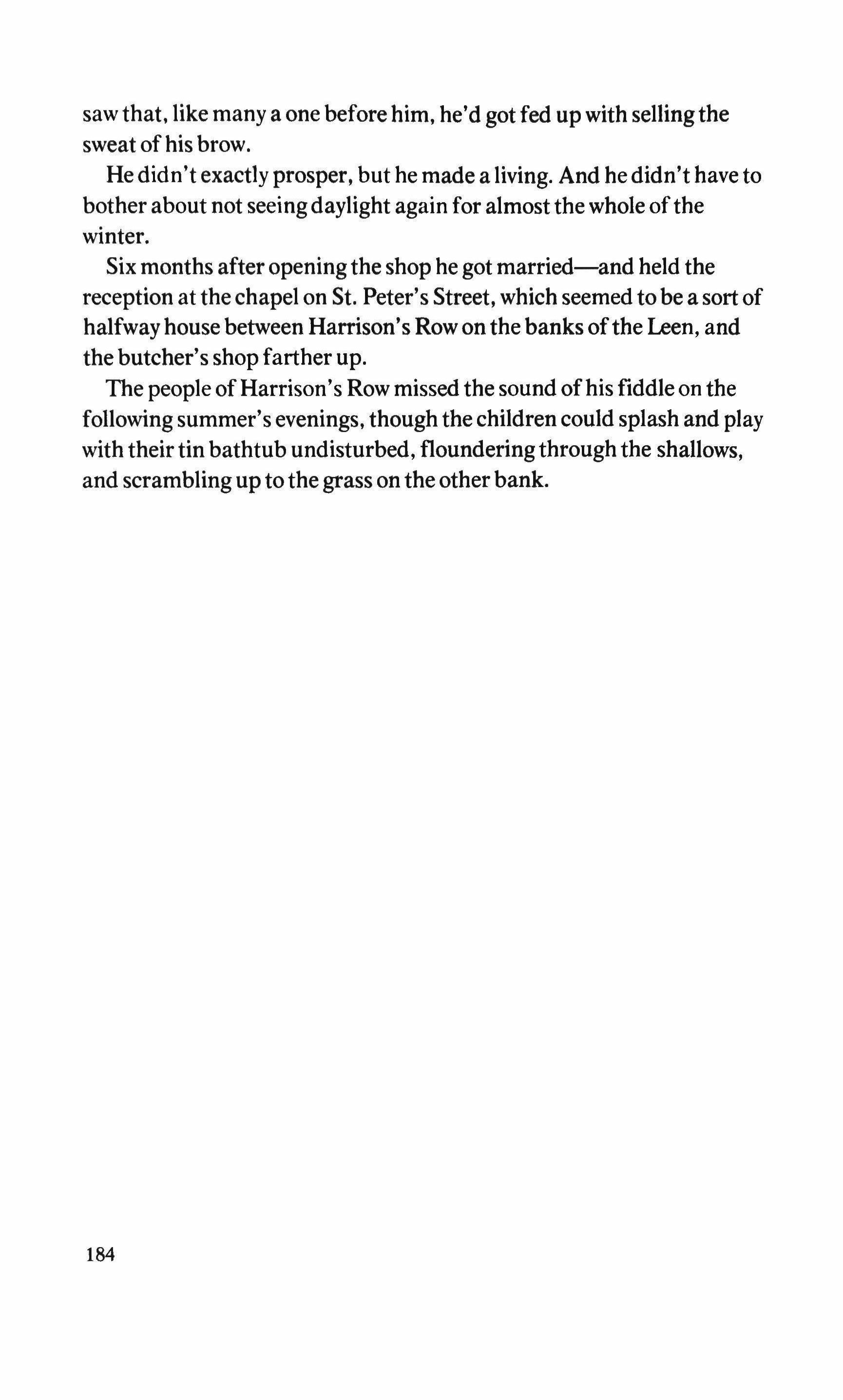
saw that, like many a one before him, he'd got fed up with sellingthe sweat ofhis brow.
He didn't exactly prosper, but he made a living. And he didn't have to bother about not seeingdaylight again for almost the whole ofthe winter.
Six months after openingthe shop he got married-and held the reception at the chapel on St. Peter's Street, which seemed to be a sort of halfwayhouse between Harrison's Row on the banks ofthe Leen, and the butcher's shop farther up.
The people ofHarrison's Row missed the sound ofhis fiddle on the following summer's evenings, though the children could splash and play with theirtin bathtub undisturbed, flounderingthrough the shallows, and scrambling up to the grass on the other bank.
184
The crystal world: notes on excerpts from Cesare Pavese's Thejob ofliving
Richard Komer
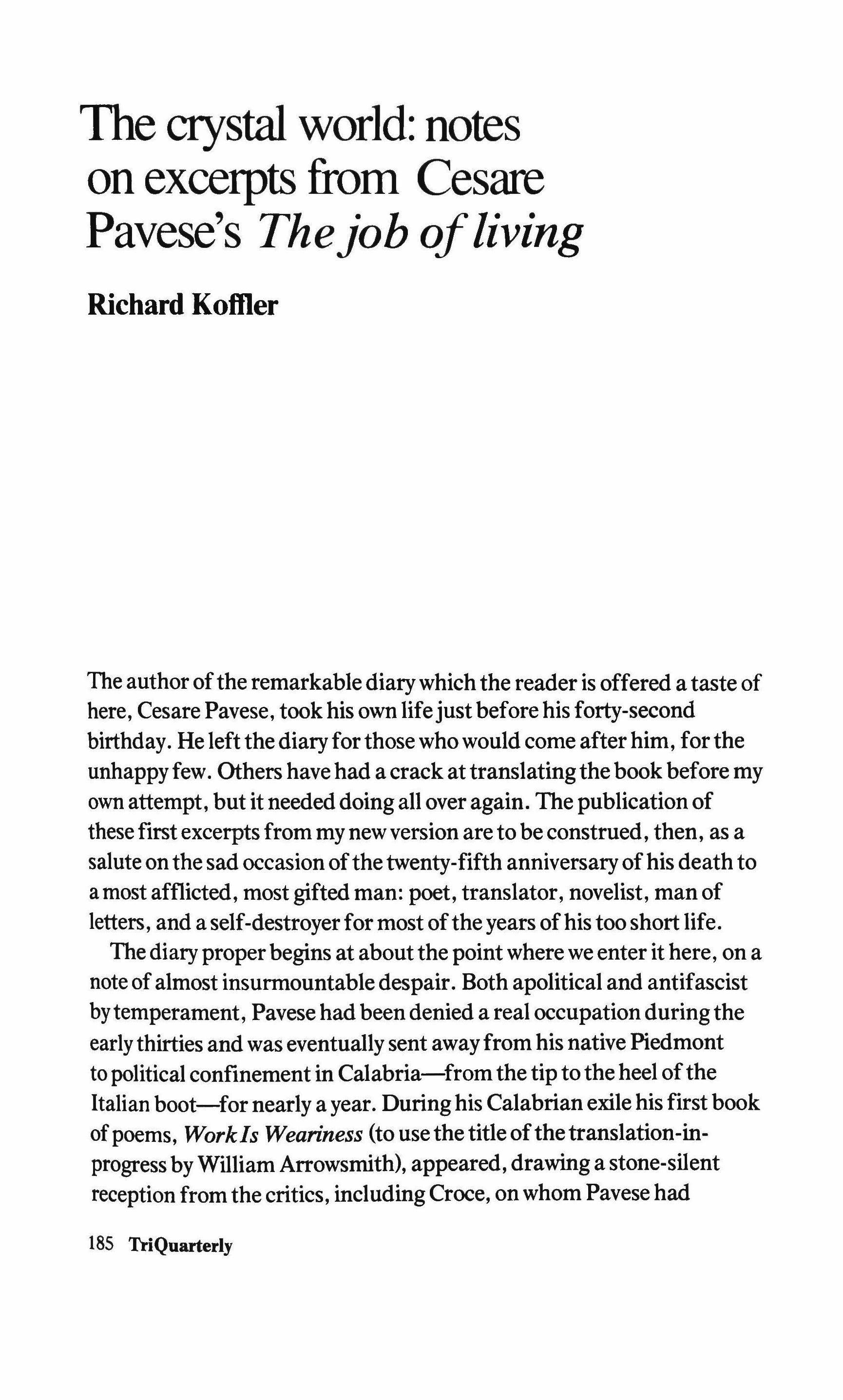
The author ofthe remarkable diarywhichthe reader is offered a taste of here, Cesare Pavese, took his own lifejustbefore his forty-second birthday. He left thediaryforthose whowould come after him, forthe unhappyfew. Others havehad a crack at translatingthebook before my own attempt, but it needed doing all over again. The publicationof thesefirstexcerpts from my new version are to be construed, then, as a salute on the sad occasion ofthetwenty-fifthanniversaryofhis death to a most afflicted, most gifted man: poet, translator, novelist, man of letters, and a self-destroyerfor most ofthe years ofhis too short life.
The diary properbegins at about the point where we enter it here, on a note ofalmost insurmountable despair. Both apolitical and antifascist bytemperament, Pavese had been denied a real occupationduringthe earlythirties and was eventually sent awayfrom his native Piedmont to political confinement in Calabria-from the tip to the heel ofthe Italian boot-for nearly a year. Duringhis Calabrian exile his first book ofpoems, Workls Weariness (tousethetitleofthetranslation-inprogressby William Arrowsmith), appeared,drawing a stone-silent reception from the critics, including Croce, on whom Pavese had
185 TriQuarterly
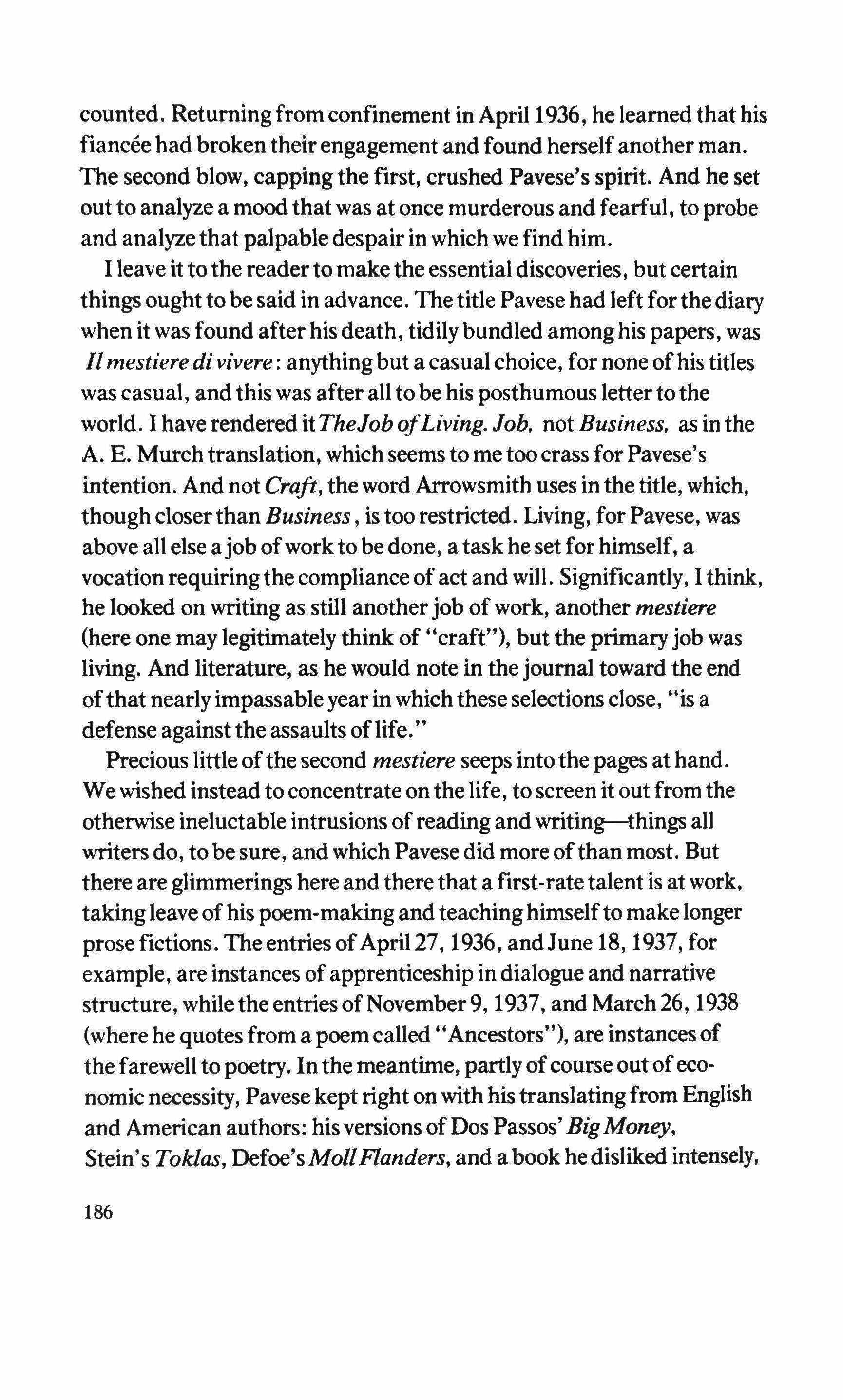
counted. Returningfrom confinement in April 1936, he learned that his fiancee had broken their engagement and found herselfanother man. The second blow, capping the first, crushed Pavese's spirit. And he set out to analyze a mood that was at once murderous and fearful, to probe and analyzethat palpabledespair in which we find him.
I leave it to the reader to make the essential discoveries, but certain thingsought to be said in advance. The title Pavese had left forthediary when it was found after his death, tidily bundled amonghis papers, was II mestiere di vivere: anythingbut a casual choice, for none ofhis titles was casual, and this was after all to be his posthumous letter to the world. I have rendered itTheJob ofLiving. Job, not Business, as in the A. E. Murch translation, which seems to me too crass for Pavese's intention. And not Craft, the word Arrowsmith uses in the title, which, though closerthan Business, is too restricted. Living, for Pavese, was above all else ajob ofwork to be done, a task he set for himself, a vocation requiringthe compliance of act and will. Significantly, I think, he looked on writing as still anotherjob of work, another mestiere (here one may legitimately think of "craft"), but the primaryjob was living. And literature, as he would note in the journal toward the end ofthat nearlyimpassableyear in which these selections close, "is a defense againstthe assaults oflife."
Precious little ofthe second mestiere seeps intothe pages at hand. We wished instead to concentrate on the life, to screen it out fromthe otherwise ineluctable intrusions of reading and writing-things all writers do, to be sure, and which Pavese did more ofthan most. But there are glimmerings here and there that a first-rate talent is at work, takingleave ofhis poem-making and teachinghimselfto make longer prose fictions. The entries ofApril 27, 1936, and June 18,1937, for example, are instances ofapprenticeship in dialogue and narrative structure, whilethe entries ofNovember 9, 1937, and March 26, 1938 (where he quotes from a poem called"Ancestors"), are instances of the farewell to poetry. In the meantime, partlyof course out of economic necessity, Pavese keptright on with his translatingfrom English and American authors: his versions of Dos Passos' BigMoney, Stein's Toklas, Defoe'sMollFlanders, and a book he disliked intensely,
186
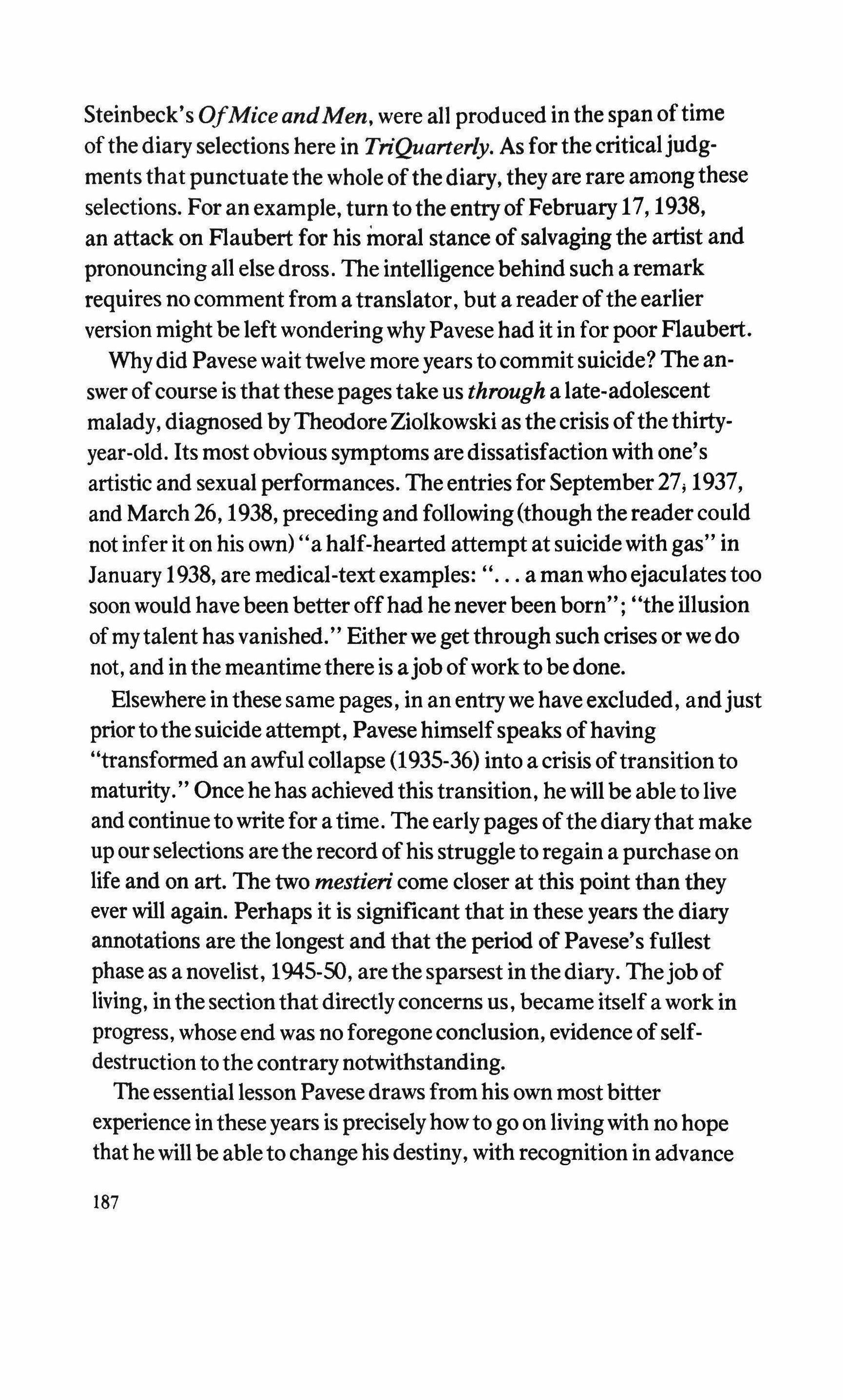
Steinbeck's OfMice andMen were all produced in the span oftime ofthe diary selections here in TriQuarterly. As forthe criticaljudgments that punctuate the whole ofthediary, they are rare amongthese selections. For an example, turn to the entryofFebruary 17, 1938, an attack on Flaubert for his moral stance of salvaging the artist and pronouncing all else dross. The intelligence behind such a remark requires no comment from a translator, but a readerofthe earlier version might be left wonderingwhy Pavese had it in for poor Flaubert.
Why did Pavese wait twelve more years to commit suicide? The answer of course is thatthese pages take us through a late-adolescent malady, diagnosedbyTheodore Ziolkowski as the crisis ofthe thirtyyear-old. Its most obvious symptoms are dissatisfactionwith one's artistic and sexual performances. The entries for September27; 1937, and March 26, 1938, preceding and following(though the reader could not inferit on his own) "a half-hearted attempt at suicidewith gas" in January 1938, are medical-text examples: " a man who ejaculates too soon would have been better offhad he never been born"; "the illusion ofmytalent hasvanished." Either we getthrough such crises or we do not, and in the meantime there is ajob ofwork to bedone.
Elsewhere in these same pages, in an entry we have excluded, andjust prior tothe suicide attempt, Pavese himselfspeaks ofhaving "transformed an awful collapse (1935-36) into a crisis oftransition to maturity." Once he has achieved this transition, he will be able to live and continue to write for a time. The earlypages ofthediarythat make up our selections are the record ofhis struggle to regain a purchase on life and on art. The two mestieri come closer at this point than they ever will again. Perhaps it is significant that in these years the diary annotations are the longest and that the period of Pavese's fullest phase as a novelist, 1945-50, are the sparsest inthe diary. Thejob of living, inthe section that directly concerns us, became itself a work in progress, whose end was no foregoneconclusion, evidence ofselfdestruction to the contrarynotwithstanding.
The essential lesson Pavese draws from his own most bitter experience in these years is preciselyhow to go on livingwith no hope that he will be able to changehis destiny, with recognition in advance
187
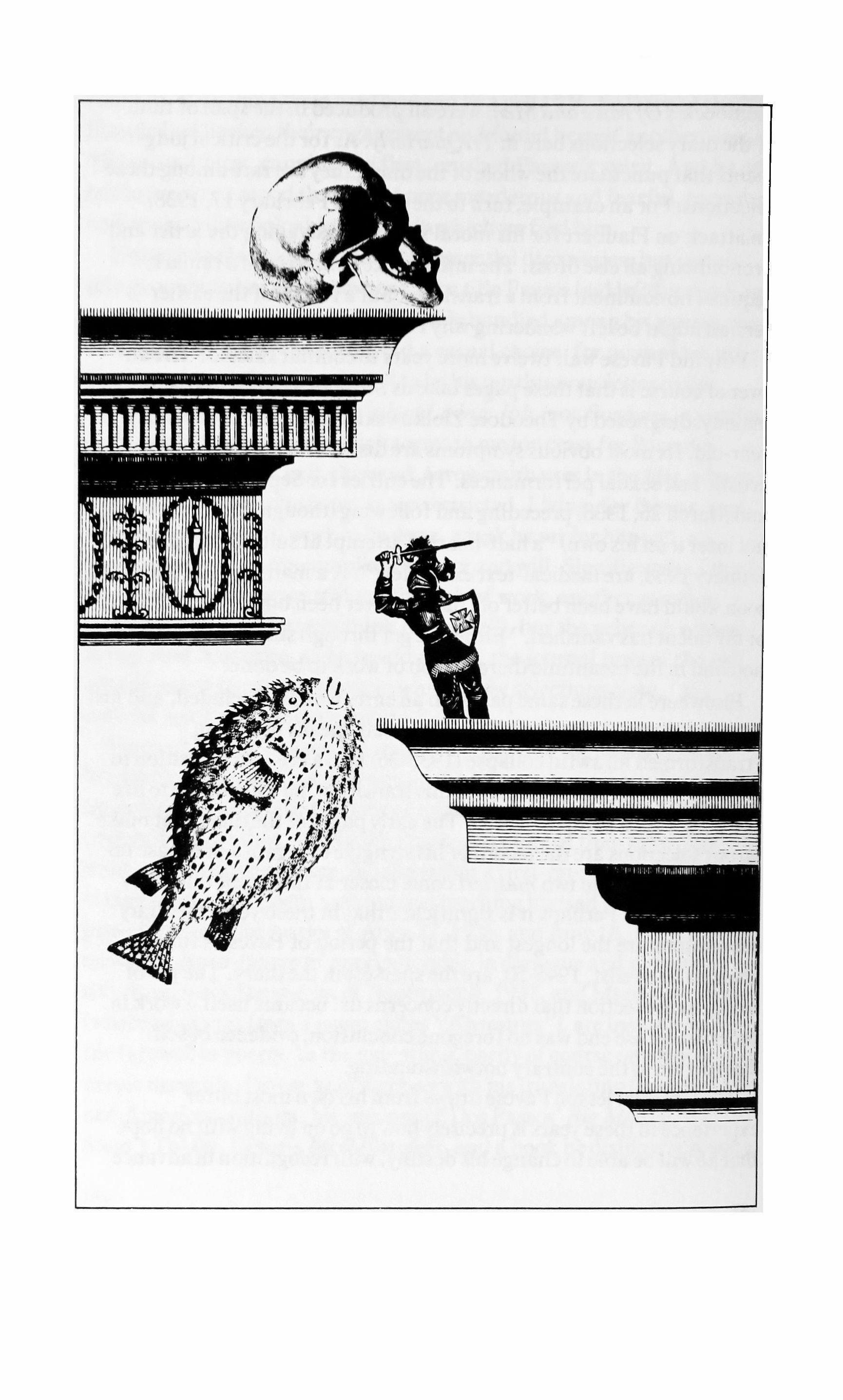
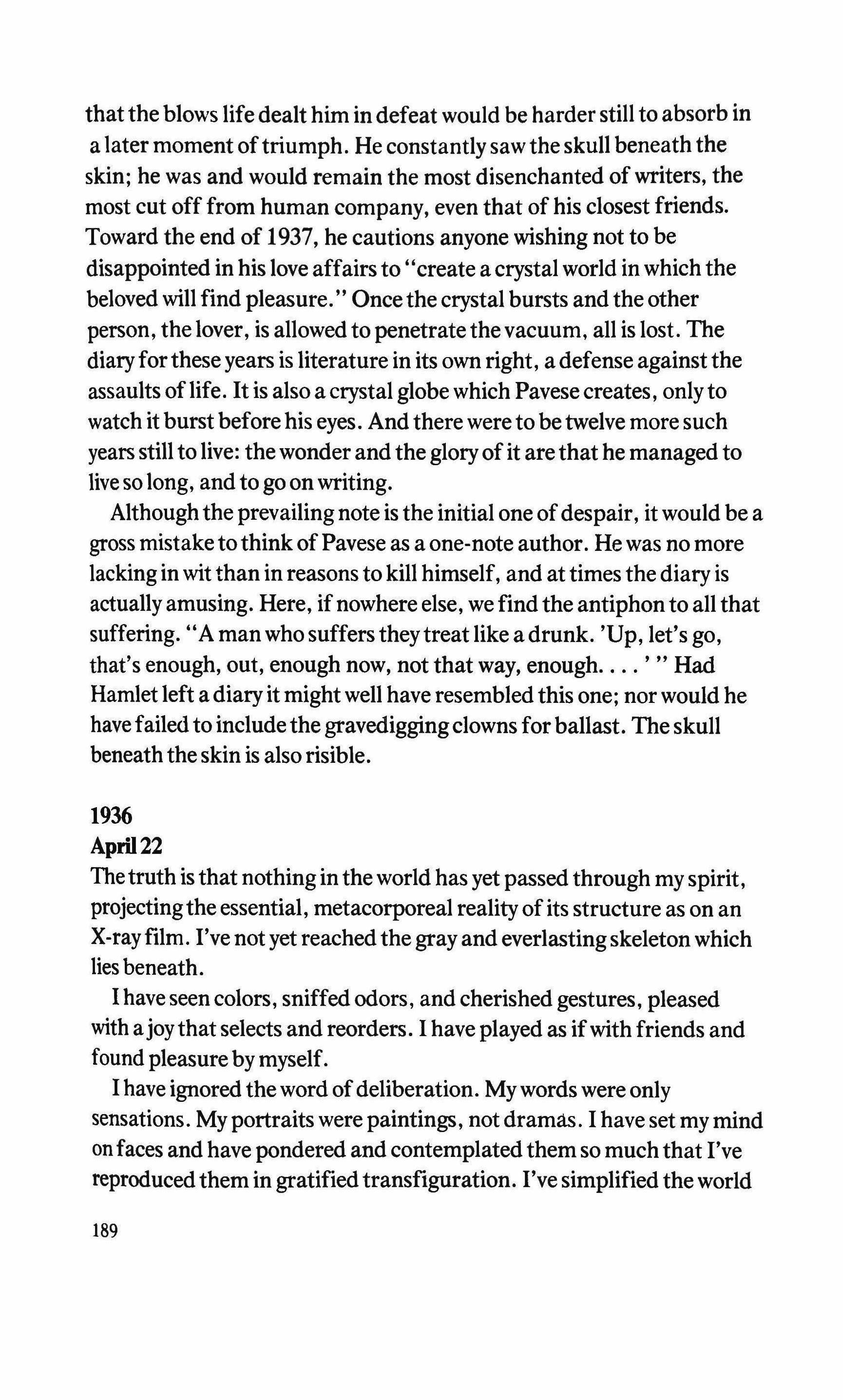
thatthe blows life dealt him indefeat would be harder still to absorb in a later moment oftriumph. He constantly saw the skull beneath the skin; he was and would remain the most disenchanted of writers, the most cut off from human company, even that of his closest friends. Toward the end of 1937, he cautions anyone wishing not to be disappointed in his love affairs to "create a crystal world in which the beloved will find pleasure." Oncethe crystal bursts and the other person, the lover, is allowed to penetrate the vacuum, all is lost. The diaryforthese years is literature in its own right, a defense against the assaults oflife. It is also a crystalglobe which Pavese creates, only to watch it burst before his eyes. And there were to betwelve more such years still to live: thewonder and the gloryofit are that he managed to live so long, and to go on writing.
Althoughthe prevailing note is the initial one ofdespair, it would be a gross mistake tothink ofPavese as a one-note author. He was no more lacking in wit than in reasons to kill himself, and at times the diary is actuallyamusing. Here, ifnowhere else, we find the antiphon to all that suffering. "A man who suffers theytreat like a drunk. 'Up, let's go, that's enough, out, enough now, not that way, enough Had Hamlet left a diaryitmight well have resembled this one; nor would he have failed to include the gravediggingclowns forballast. The skull beneath the skin is also risible.
1936 April22
Thetruth is that nothing in theworld has yet passedthrough my spirit, projectingthe essential, metacorporeal reality ofits structure as on an X-rayfilm. I've not yet reachedthe gray and everlastingskeleton which lies beneath.
I have seen colors, sniffed odors, and cherished gestures, pleased with ajoythat selects and reorders. I have played as ifwith friends and found pleasurebymyself.
I have ignored the word ofdeliberation. Mywords were only sensations. Myportraits were paintings, not dramas. I have set my mind on faces and have pondered and contemplated them so muchthat I've reproducedthem in gratifiedtransfiguration. I've simplified the world
189
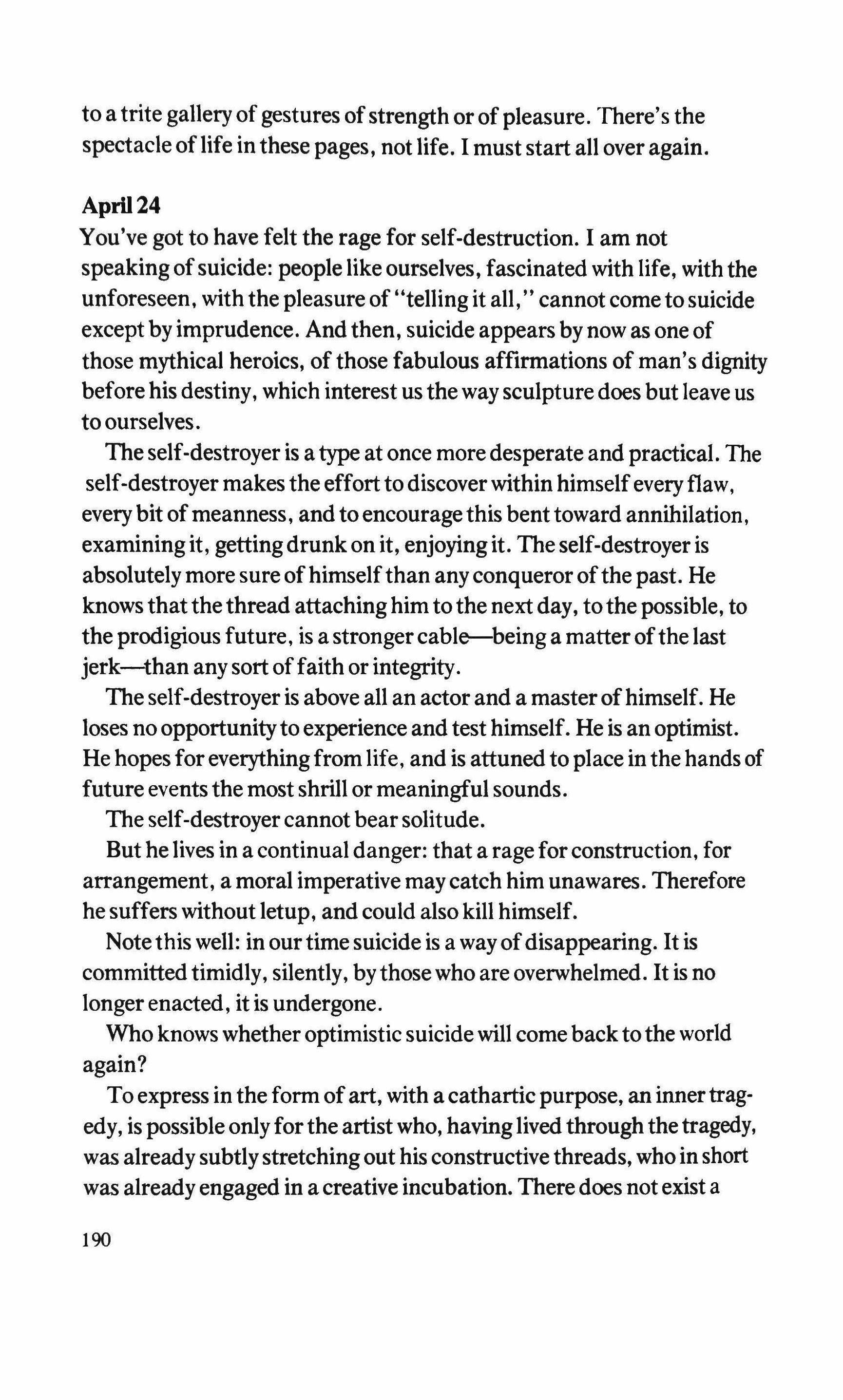
to a trite gallery of gestures ofstrength or of pleasure. There's the spectacle oflife in these pages, not life. I must start all over again.
AprU24
You've got to have felt the rage for self-destruction. I am not speaking ofsuicide: people like ourselves. fascinated with life, with the unforeseen, with the pleasure of "telling it all," cannot come to suicide exceptbyimprudence. And then. suicide appears by now as one of those mythical heroics. of those fabulous affirmations of man's dignity before his destiny, which interest us the way sculpture does but leave us to ourselves.
The self-destroyer is a type at once more desperate and practical. The self-destroyer makes the effort to discover within himselfevery flaw, everybit of meanness, and to encourage this benttoward annihilation, examiningit, gettingdrunk on it. enjoyingit. The self-destroyer is absolutely more sure ofhimselfthan any conqueror ofthe past. He knows thatthethread attaching him to the next day, tothe possible, to the prodigious future, is a strongercable-being a matter ofthe last jerk-than any sort offaith or integrity.
The self-destroyer is above all an actor and a master ofhimself. He loses no opportunityto experience and test himself. He is an optimist. He hopes for everythingfrom life, and is attuned to place in the hands of future events the most shrill or meaningful sounds.
The self-destroyer cannot bearsolitude.
But he lives in a continual danger: that a rage forconstruction, for arrangement, a moral imperative may catch him unawares. Therefore he suffers without letup, and could also kill himself.
Note this well: in our time suicide is a way ofdisappearing. It is committed timidly, silently, bythosewho are overwhelmed. It is no longerenacted, it is undergone.
Who knows whether optimistic suicide will come back to the world again?
To express in the form ofart, with a cathartic purpose, an innertragedy, is possibleonlyforthe artist who, havinglived through thetragedy, was alreadysubtlystretching out his constructive threads, whoinshort was alreadyengaged in a creative incubation. There does not exist a
190
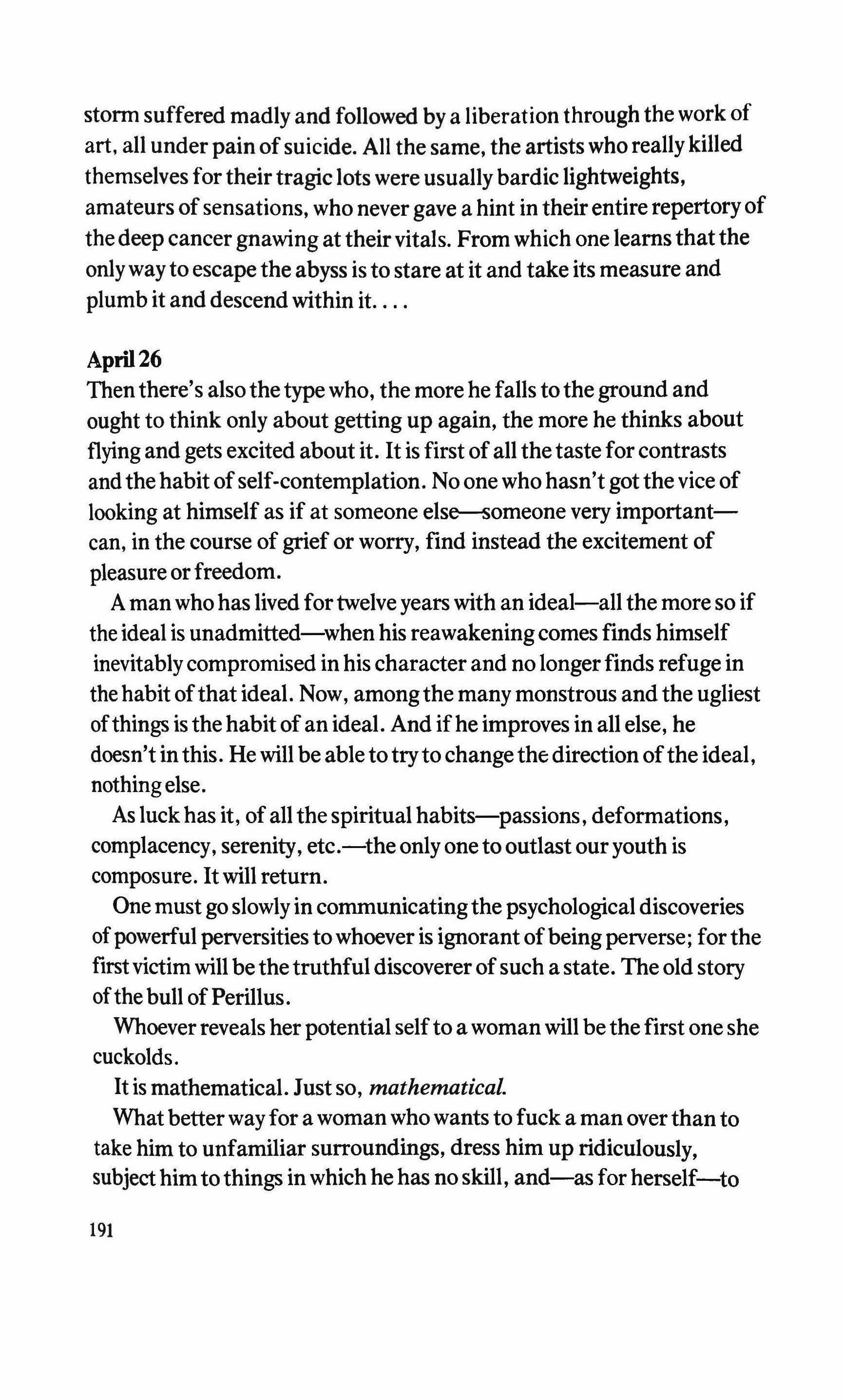
storm suffered madly and followed by a liberation through the work of art, all under pain of suicide. All the same, the artists who really killed themselves for theirtragic lots were usually bardic lightweights, amateurs of sensations, who never gave a hint in theirentire repertory of thedeep cancer gnawing at theirvitals. From which one learns thatthe onlyway to escape the abyss is to stare at it and take its measure and plumb it and descend within it.
April 26
Then there's alsothetypewho, the more he falls tothe ground and ought to think only about getting up again, the more he thinks about flying and gets excited about it. It is first ofall the taste for contrasts and thehabit ofself-contemplation. No one who hasn't gotthe vice of looking at himself as if at someone else--someone very importantcan, in the course of grief or worry, find instead the excitement of pleasure or freedom.
A man who has lived fortwelve years with an ideal-all the more so if theideal is unadmitted-when his reawakening comes finds himself inevitablycompromised in his character and no longerfinds refuge in thehabit ofthat ideal. Now, amongthe many monstrous and the ugliest ofthings is the habit of an ideal. And ifhe improves in all else, he doesn't inthis. He will be able to tryto changethe direction ofthe ideal, nothingelse.
As luck has it, ofall the spiritualhabits-passions, deformations, complacency, serenity, etc.-the only one to outlast our youth is composure. It will return.
One must go slowlyin communicatingthe psychological discoveries ofpowerfulperversities towhoever is ignorant ofbeing perverse; forthe firstvictim will bethetruthful discoverer ofsuch a state. The old story ofthebull ofPerillus.
Whoeverreveals her potential selfto a woman will be thefirst one she cuckolds.
It is mathematical. Just so, mathematical.
Whatbetter wayfor a woman who wants to fuck a man over than to take him to unfamiliar surroundings, dress him up ridiculously, subject himto things inwhich he has no skill, and-as for herself-to
191

have inthe meantime other things to do, maybe those verythings which the man can't do? Not onlyis he diddled in the world's eyes, but-the importantthing for a woman, who is the most rational animal that exists--she is convinced that he ought to be diddled, and her clear conscience is preserved. Because with skill and experience we arrive at this incredible thing: to prearrange things and facts, the chains of causality, in such a way that whatever we want will happen without offending our principles ofethical behavior.
April27
He tells itthis way:
Shetold me, one day, how she would treat me. It was atthat anxious time when nothinghad happened but it was bound to happen. I made herspeak ofher past, in a frenzyto know as much as I could about her, and to make a place for it in the dreams I indulge in.
"She told of a simpleyoung man who had annoyed her on a train. She had infatuated him. With words and gestures. (She had taken a trip with me, too.) Then she had ended bygivinghim a false name. And the young man had written to ask herto marry him.
April28
But come now: has youth ever meant anything in my craft? And if the seven years weren't lost, ifthey had ended well, that is, with my composingof poems that would last, finding out howto work with satisfaction, gratefullypaired offfor life, married and merry inthe publicspectacle; ifeverythinghad gone that way, would I have something more? Would it have been worthwhile?Would I be sitting at this table with greaterjoy?
And if I were to answer that I should be happyto have attachments, to have duties, wouldn't I be sayingsomethinguseless, since one always has some duties, provided he wants them?
And so, so it is only she that I reallyregret? The woman who fucked me over? But ifall the rest is unchanged, what more does she represent than a trite emotional disappointment?
Myhappyyoung man, it isn't even permissible to sink into a grand
192
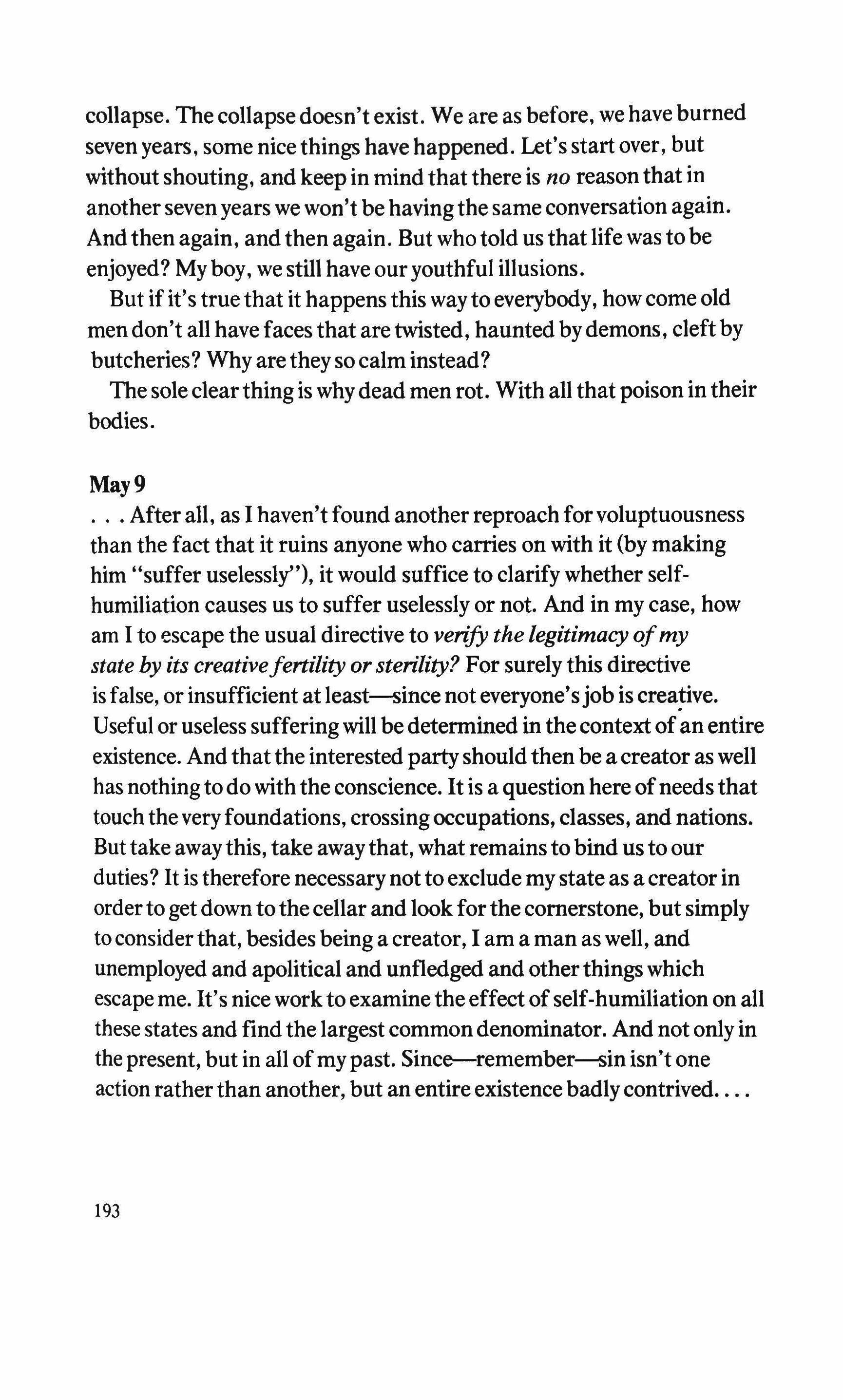
collapse. The collapsedoesn't exist. We are as before. we have burned seven years. some nice things have happened. Let's start over, but without shouting, and keep in mind that there is no reason that in another seven years we won't be havingthe same conversation again. And then again. and then again. But who told us that life was to be enjoyed? Myboy. we still have our youthful illusions.
But ifit's true that it happens this way to everybody, how come old men don't all have faces that are twisted, haunted bydemons, cleft by butcheries? Why are they so calm instead?
The sole clearthing is whydead men rot. With all that poison in their bodies.
May 9
After all, as I haven't found another reproach forvoluptuousness than the fact that it ruins anyone who carries on with it (by making him "suffer uselessly"), it would suffice to clarify whether selfhumiliation causes us to suffer uselessly or not. And in my case, how am I to escape the usual directive to verify the legitimacyofmy state by its creativefertility or sterility? For surely this directive is false, or insufficient at least-since not everyone'sjob is creative. Useful or useless suffering will be determined in the context of an entire existence. And thatthe interested party should then be a creator as well has nothing to do with the conscience. It is a question here ofneeds that touch the very foundations, crossingoccupations, classes, and nations. But take awaythis, take awaythat, what remains to bind us to our duties? It is therefore necessary not to exclude my state as a creator in order to get down to the cellar and look forthecornerstone, but simply to considerthat, besides being a creator, I am a man as well, and unemployed and apolitical and unfledged and otherthingswhich escape me. It's nice work to examine theeffect ofself-humiliation on all these states and find the largest common denominator. And not only in the present, but in all ofmy past. Since-remember-sin isn't one action ratherthan another, but an entire existence badlycontrived
193
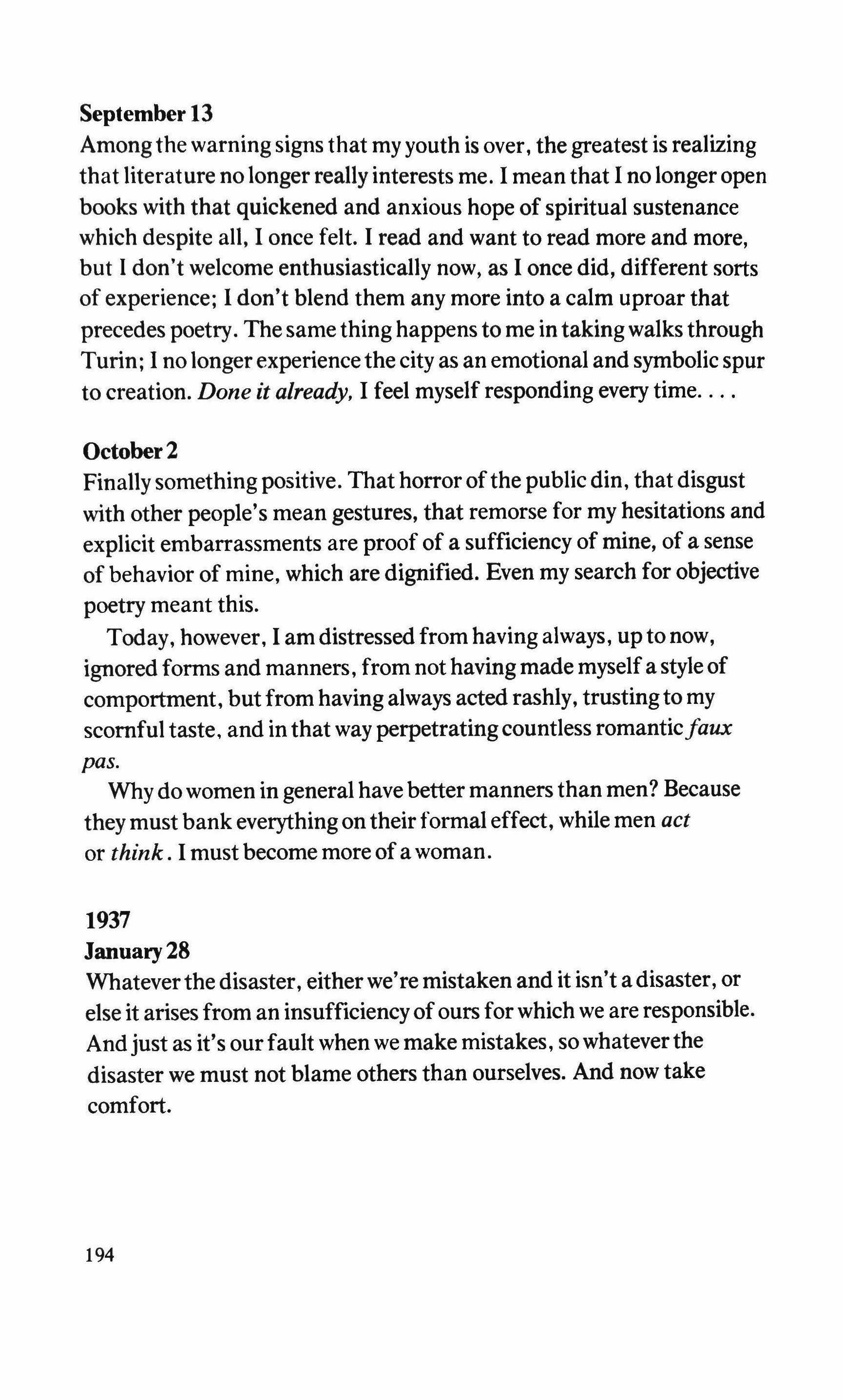
September 13
Among the warningsigns that my youth is over, the greatest is realizing that literature no longerreally interests me. I mean that I no longer open books with that quickened and anxious hope of spiritual sustenance which despite all, I once felt. I read and want to read more and more, but I don't welcome enthusiastically now, as I once did, different sorts of experience; I don't blend them any more into a calm uproar that precedes poetry. The same thinghappens to me intakingwalks through Turin; I no longerexperiencethe city as an emotional and symbolic spur to creation. Done it already, I feel myselfresponding every time
October2
Finallysomethingpositive. That horror ofthe public din, that disgust with other people's mean gestures, that remorse for my hesitations and explicit embarrassments are proof of a sufficiency of mine, of a sense of behavior of mine, which are dignified. Even my search for objective poetry meant this.
Today, however, I am distressed from havingalways, up to now, ignored forms and manners, from not having made myself a style of comportment, but from havingalways acted rashly, trustingto my scornful taste, and in that way perpetratingcountless romanticfaux pas.
Why do women in general have better manners than men? Because they must bank everything on theirformal effect, while men act or think. I must become more of a woman.
1937 January 28
Whateverthe disaster, eitherwe're mistaken and it isn't a disaster, or else it arises from an insufficiency of ours for which we are responsible. And just as it's our fault when we make mistakes, so whateverthe disaster we must not blame others than ourselves. And now take comfort.
194
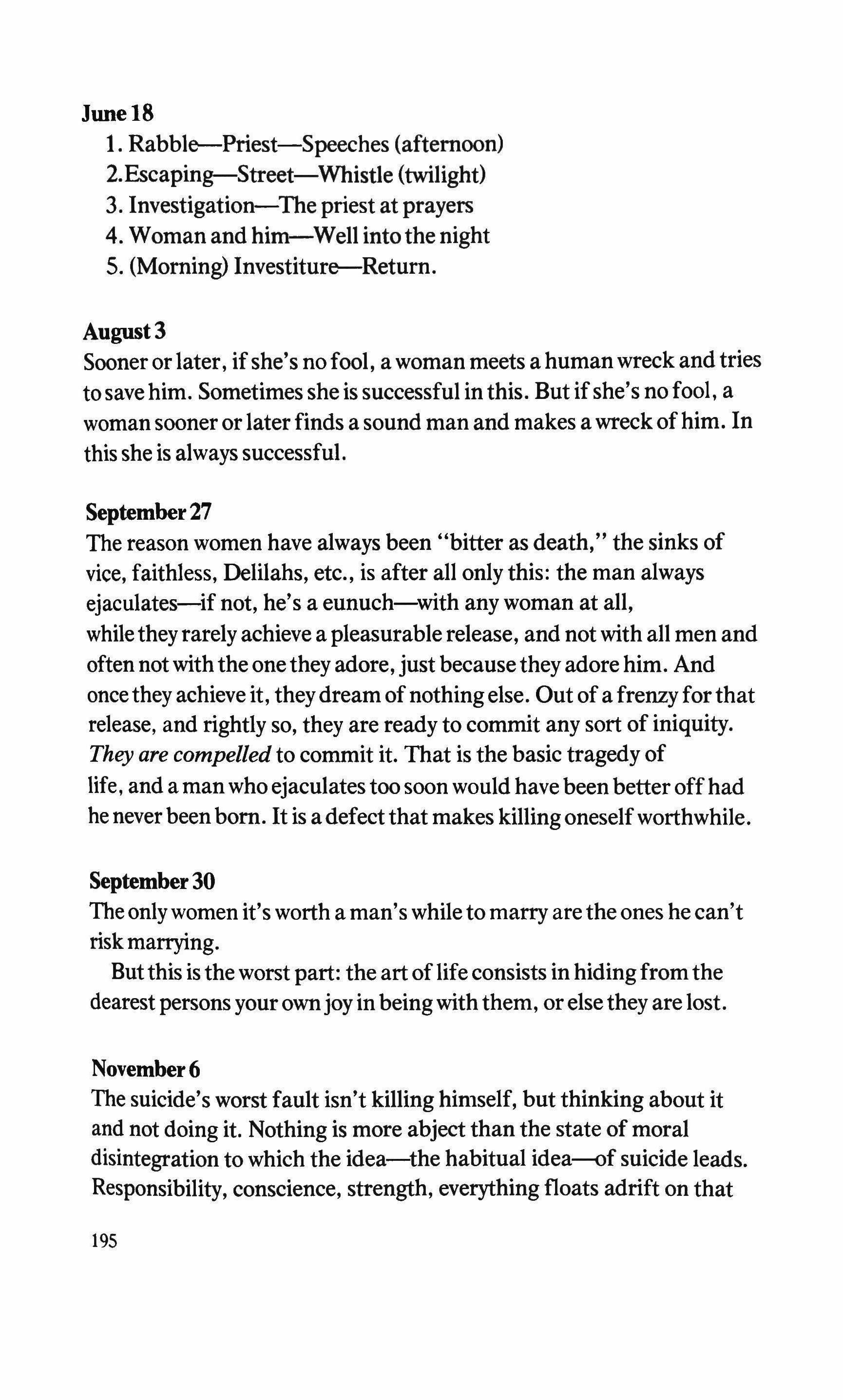
June 18
1. Rabble-Priest-Speeches (afternoon)
2.Escaping-Street-Whistle (twilight)
3. Investigation-Thepriest at prayers
4. Woman and him-Well intothe night
S. (Morning) Investiture-Return.
August 3
Sooner or later, ifshe's no fool, a woman meets a human wreck and tries to save him. Sometimes she is successful in this. But ifshe's no fool, a woman sooner or later finds a sound man and makes a wreckofhim. In this she is always successful.
September27
The reason women have always been "bitter as death," the sinks of vice, faithless, Delilahs, etc., is after all only this: the man always ejaculates-if not, he's a eunuch-with any woman at all, whiletheyrarely achieve a pleasurablerelease, and not with all men and often not with the one theyadore, just becausethey adore him. And once they achieve it, theydream ofnothing else. Out of a frenzy forthat release, and rightly so, they are ready to commit any sort of iniquity. They are compelled to commit it. That is the basic tragedy of life, and a man who ejaculates too soon would have been better offhad he never beenborn. It is a defect that makes killing oneselfworthwhile.
September30
The only women it's worth a man's while to marry are the ones he can't risk marrying.
Butthis is the worst part: the art oflife consists in hiding fromthe dearest persons your own joyinbeingwith them, or elsethey are lost.
November6
The suicide's worst fault isn't killing himself, but thinking about it and not doing it. Nothing is more abject than the state of moral disintegration to which the idea-the habitual idea-of suicide leads. Responsibility, conscience, strength, everything floats adrift on that
195
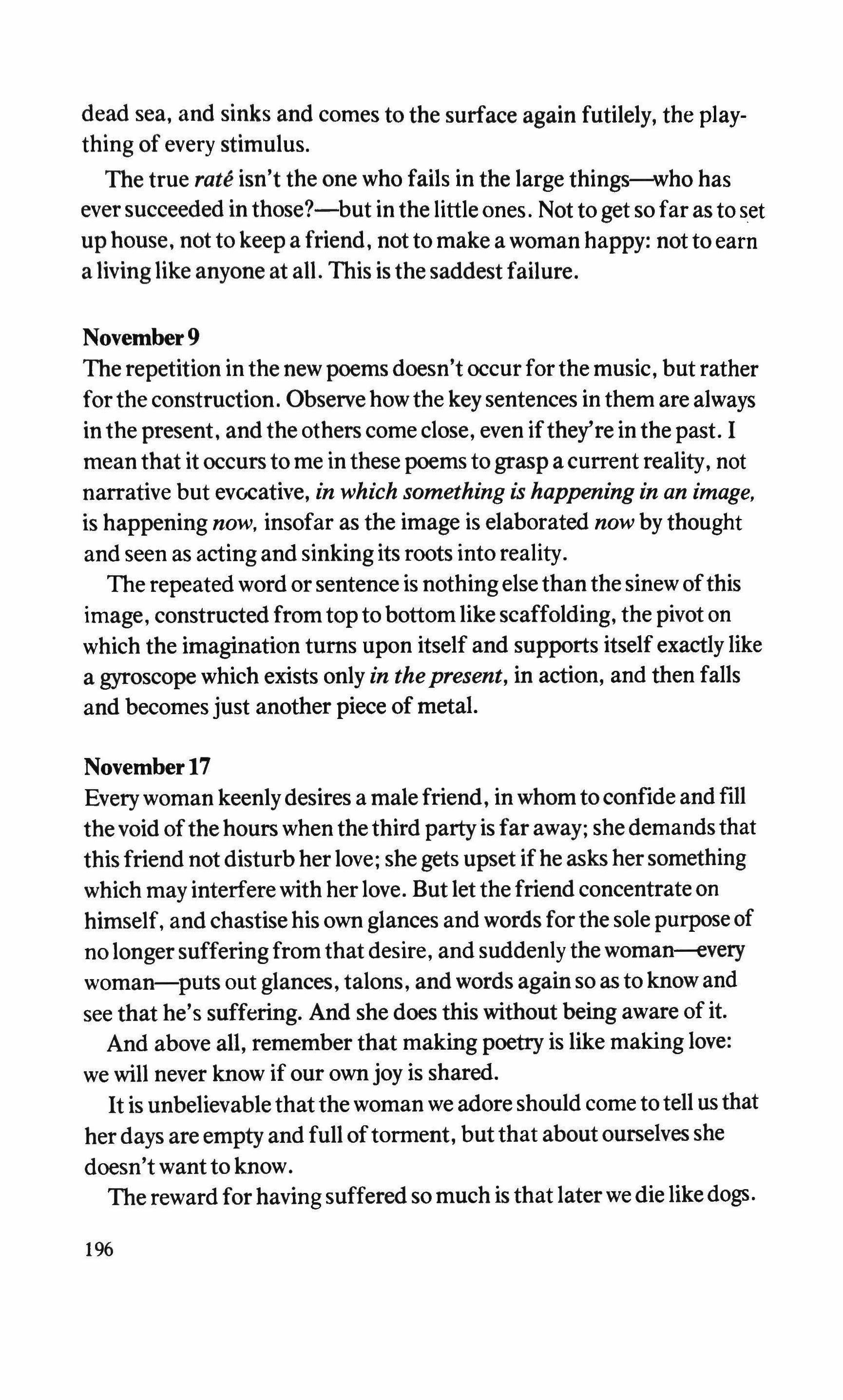
dead sea, and sinks and comes to the surface again futilely, the plaything of every stimulus.
The true rate isn't the one who fails in the large things--who has ever succeeded inthose?-but in the little ones. Not to get so far as to set up house, not to keep a friend, not to make a woman happy: not to earn a living like anyone at all. This is the saddest failure.
November9
The repetition in the new poems doesn't occur for the music, but rather forthe construction. Observe howthe key sentences in them are always in the present, and the others come close, even ifthey're in the past. I mean that it occurs to me in these poems to grasp a current reality, not narrative but evocative, in which something is happening in an image, is happening now, insofar as the image is elaborated now bythought and seen as acting and sinkingits roots into reality.
The repeated word or sentence is nothingelsethan the sinew ofthis image, constructed from top to bottom like scaffolding, the pivot on which the imagination turns upon itself and supports itself exactly like a gyroscope which exists only in thepresent, in action, and then falls and becomesjust another piece of metal.
November 17
Every woman keenlydesires a male friend, in whom to confide and fill thevoid ofthehours when thethird partyis far away; she demandsthat this friend not disturb her love; she gets upset if he asks her something which may interfere with her love. But let the friend concentrate on himself, and chastise his own glances and words forthe sole purpose of no longersufferingfromthat desire, and suddenly the woman--every woman-puts out glances, talons, and words again so as to know and see that he's suffering. And she does this without being aware of it.
And above all, remember that making poetry is like making love: we will never know if our own joy is shared.
It is unbelievable that the woman we adore should come to tell us that her days are empty and full oftorment, butthat about ourselves she doesn't want to know.
The reward for havingsuffered so much is that later we die likedogs.
196
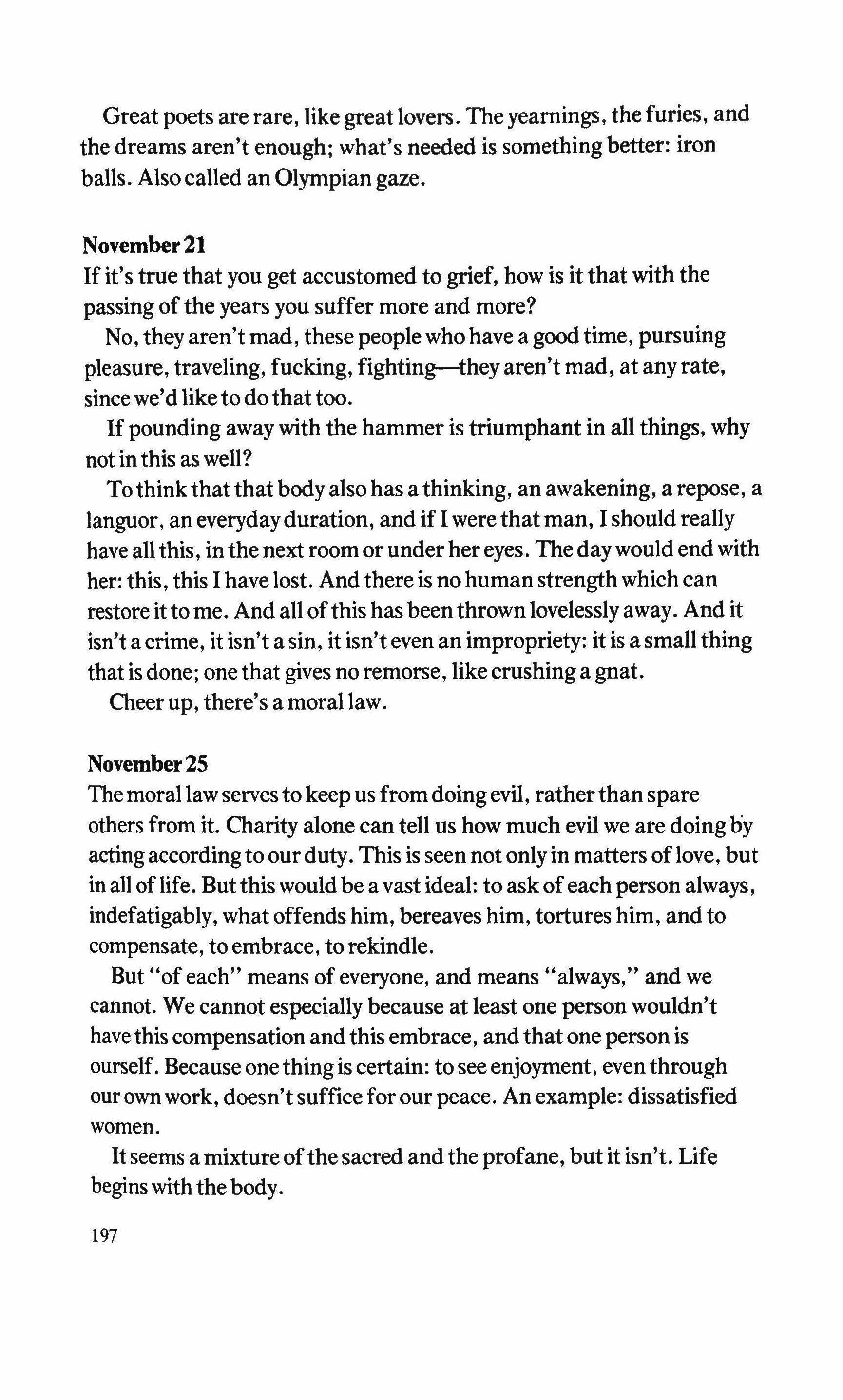
Great poets are rare, like great lovers. Theyearnings. the furies, and the dreams aren't enough; what's needed is something better: iron balls. Also called an Olympian gaze.
November21
If it's true that you get accustomed to grief, how is it that with the passing of the years you suffer more and more?
No, they aren't mad, these people who have a good time, pursuing pleasure, traveling. fucking, fighting-they aren't mad, at any rate, sincewe'd like to do that too.
If pounding away with the hammer is triumphant in all things, why not inthis as well?
Tothink thatthat body also has a thinking, an awakening, a repose, a languor, an everydayduration, and if I were that man, I should really have all this, in the next room or under hereyes. Theday would end with her: this, this I have lost. And there is no human strength which can restore it to me. And all ofthis has been thrown lovelessly away. And it isn't a crime, it isn't a sin, it isn't even an impropriety: it is a small thing that is done; one that gives no remorse, like crushing a gnat.
Cheerup, there's amorallaw.
November25
The moral law serves to keep us from doingevil, ratherthan spare others from it. Charity alone can tell us how much evil we are doingby actingaccording to our duty. This is seen not only in matters of love, but in all of life. But this would be a vast ideal: to ask ofeach person always, indefatigably, what offends him, bereaves him, tortures him, and to compensate, to embrace, to rekindle.
But "of each" means of everyone, and means "always," and we cannot. We cannot especially because at least one person wouldn't havethis compensation and this embrace, and that one person is ourself. Because one thing is certain: to see enjoyment, even through our own work, doesn't suffice for our peace. An example: dissatisfied women.
It seems a mixture ofthe sacred and the profane, but it isn't. Life begins with thebody.
197
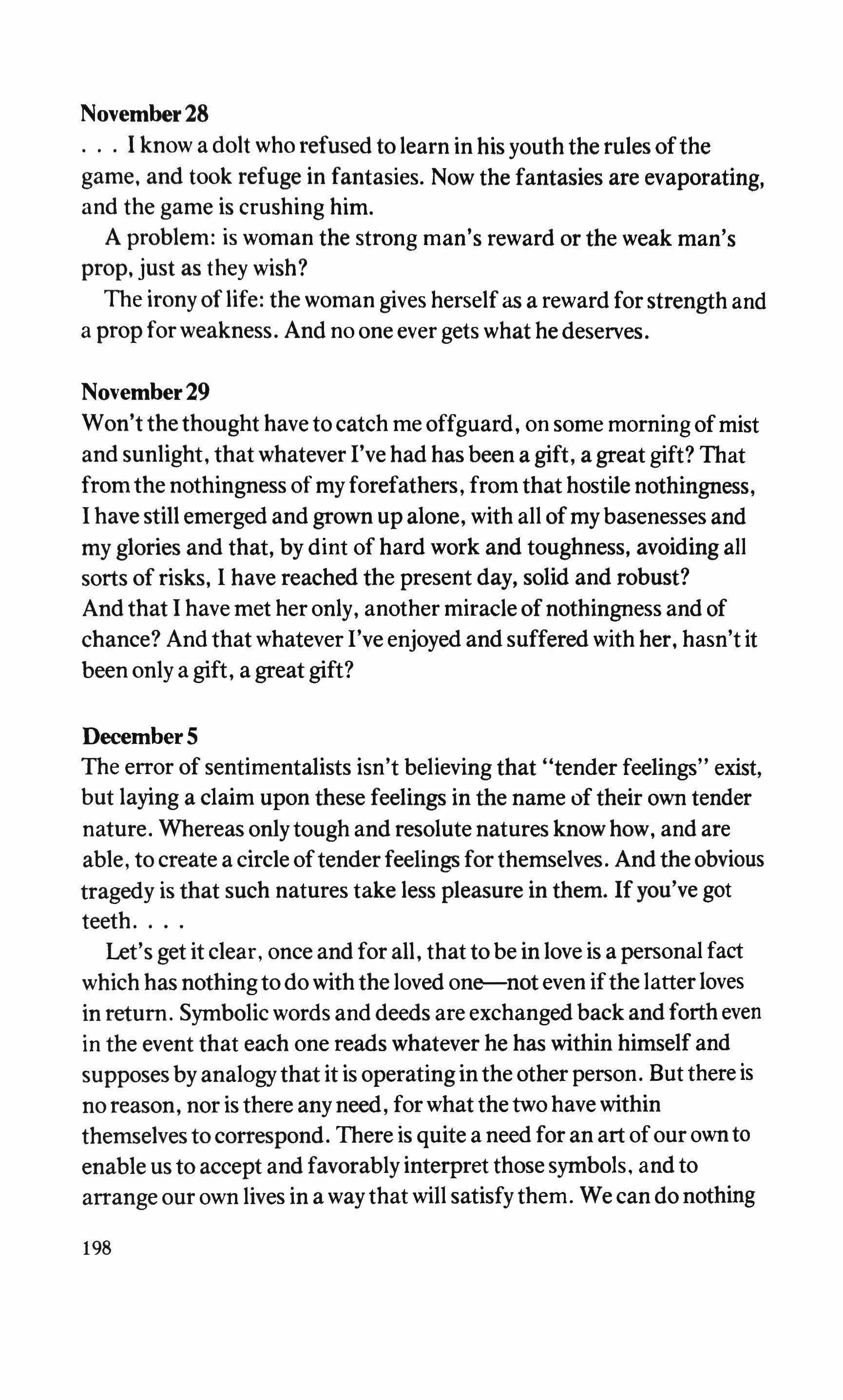
November28
I know a dolt who refused to learn in his youth the rules ofthe game. and took refuge in fantasies. Now the fantasies are evaporating, and the game is crushing him.
A problem: is woman the strong man's reward or the weak man's prop. just as they wish?
The irony of life: the woman gives herself as a reward for strength and a prop forweakness. And no one ever gets what he deserves.
November29
Won't the thought have to catch me offguard, on some morning ofmist and sunlight. that whatever I've had has been a gift, a great gift? That fromthe nothingness of my forefathers, from that hostile nothingness, I have still emerged and grown up alone, with all ofmybasenesses and my glories and that, by dint of hard work and toughness, avoiding all sorts of risks, I have reached the present day, solid and robust? And that I have met her only, another miracle ofnothingness and of chance? And that whatever I've enjoyed and suffered with her, hasn't it been only a gift, a great gift?
DecemberS
The error of sentimentalists isn't believing that "tender feelings" exist, but laying a claim upon these feelings in the name of their own tender nature. Whereas onlytough and resolute natures know how. and are able, to create a circle oftender feelings for themselves. And the obvious tragedy is that such natures take less pleasure in them. Ifyou've got teeth
Let's get it clear, once and for all, that to be in love is a personal fact which has nothing to do with the loved on�not even ifthe latterloves in return. Symbolic words and deeds are exchanged back and forth even in the event that each one reads whatever he has within himself and supposes byanalogythat it is operatinginthe other person. But there is no reason, nor is there any need, forwhat the two have within themselves to correspond. There is quite a need for an art of our own to enable us to accept and favorablyinterpret those symbols, and to arrange our own lives in a way that will satisfy them. We can do nothing
198
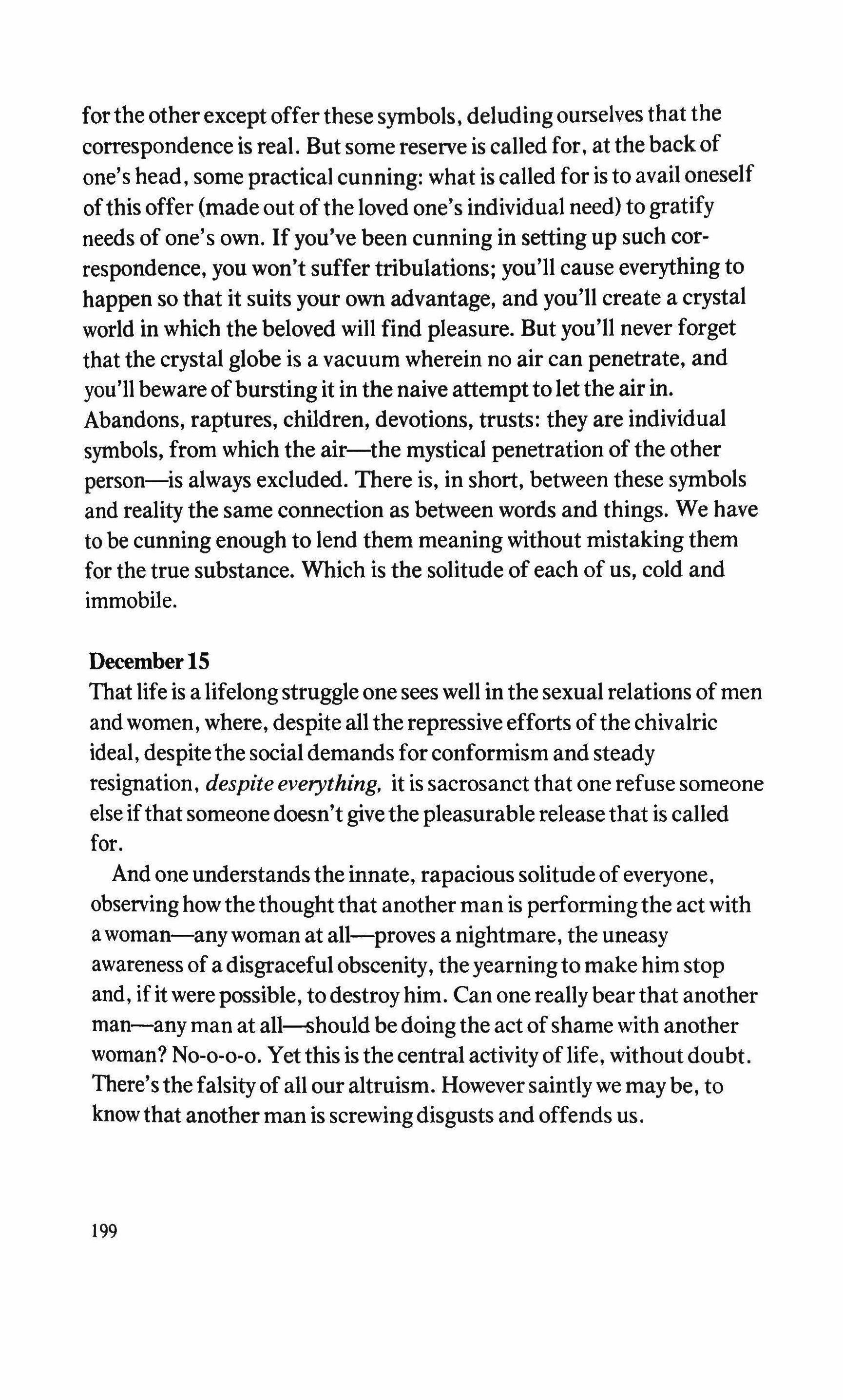
forthe other except offer these symbols, deludingourselves that the correspondence is real. But some reserve is called for, at the back of one's head, some practical cunning: what is called for is to avail oneself ofthis offer (made out ofthe loved one's individual need) to gratify needs of one's own. Ifyou've been cunning in setting up such correspondence, you won't suffer tribulations; you'll cause everything to happen so that it suits your own advantage, and you'll create a crystal world in which the beloved will find pleasure. But you'll never forget that the crystal globe is a vacuum wherein no air can penetrate, and you'll beware ofbursting it in the naive attempt to letthe air in.
Abandons, raptures, children, devotions, trusts: they are individual symbols, from which the air-the mystical penetration of the other person-is always excluded. There is, in short, between these symbols and reality the same connection as between words and things. We have to be cunning enough to lend them meaning without mistaking them for the true substance. Which is the solitude of each of us, cold and immobile.
December 15
That life is a lifelongstruggle one sees well in the sexual relations of men and women, where, despite all the repressive efforts ofthe chivalric ideal, despitethe socialdemands forconformism and steady resignation, despiteeverything, it is sacrosanct that one refuse someone else ifthat someone doesn't givethe pleasurable release that is called for.
And one understands the innate, rapacious solitude of everyone, observinghow thethoughtthat another man is performingthe act with a woman-any woman at all-proves a nightmare, the uneasy awareness of a disgracefulobscenity, the yearningto make him stop and, if it were possible, to destroy him. Can one really bear that another man-any man at all-should be doingthe act ofshame with another woman? No-o-o-o. Yet this is the central activity of life, without doubt. There's the falsity of all our altruism. However saintly we may be, to know that another man is screwingdisgusts and offends us.
199
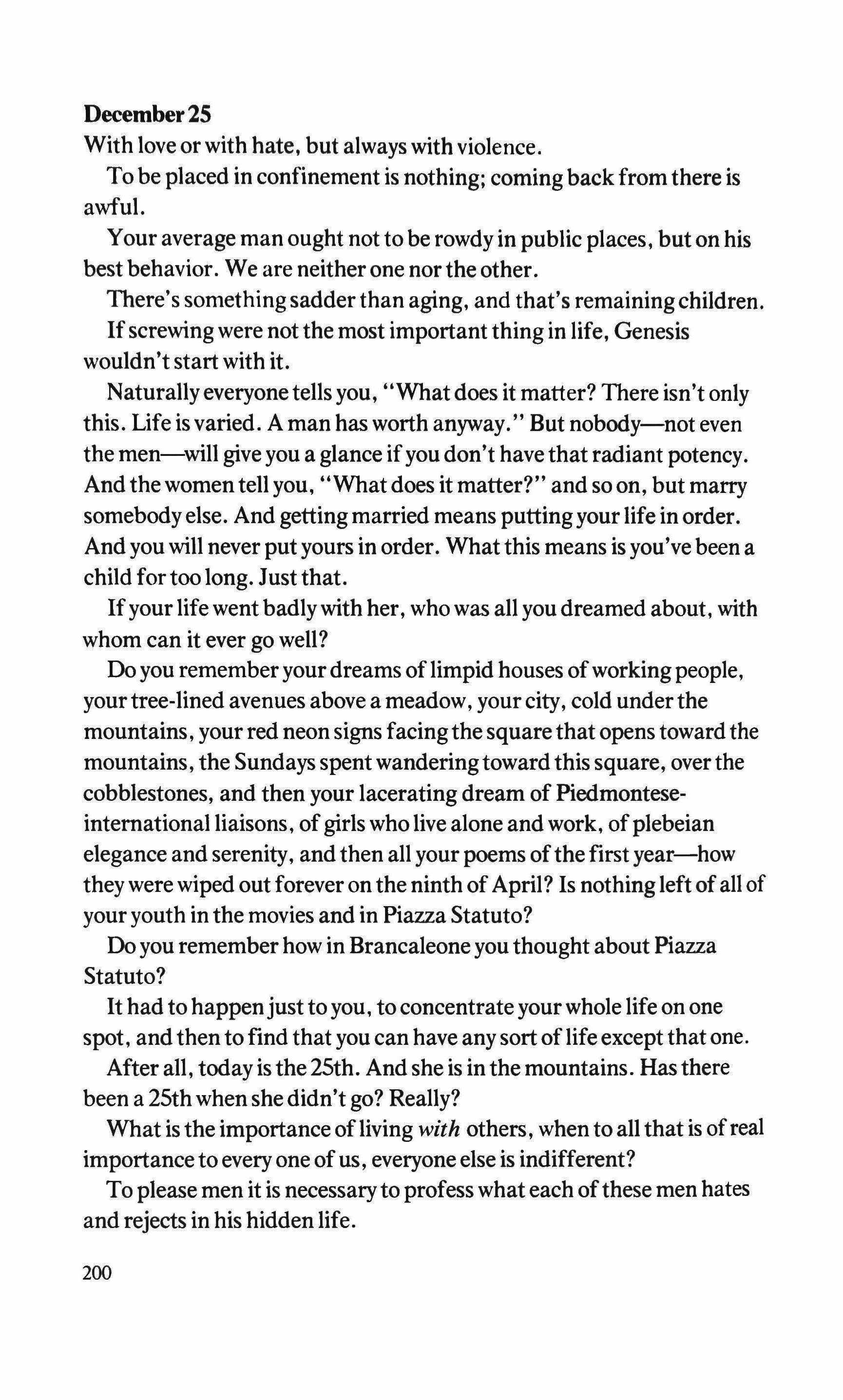
December25
With love or with hate, but always with violence. To be placed in confinement is nothing; coming back from there is awful.
Your average man ought not to be rowdy in public places, but on his best behavior. We are neither one nor the other. There's something sadder than aging, and that's remainingchildren. Ifscrewing were not the most importantthing in life, Genesis wouldn't start with it.
Naturally everyonetells you, "What does it matter? There isn't only this. Life is varied. A man has worth anyway." But nobody-not even the men-will give you a glance ifyou don't have that radiant potency. And the women tell you, "What does it matter?" and so on, but marry somebodyelse. And getting married means puttingyour life in order. And you will never put yours in order. What this means is you've been a child for too long. Just that.
Ifyour life went badlywith her, who was all you dreamed about, with whom can it ever go well?
Do you remember your dreams oflimpid houses ofworkingpeople, yourtree-lined avenues above a meadow, your city, cold underthe mountains, yourred neon signs facingthe squarethat opens toward the mountains, the Sundays spentwanderingtoward this square, over the cobblestones, and then your lacerating dream of Piedmonteseinternational liaisons, ofgirls who live alone and work, ofplebeian elegance and serenity, and then all your poems ofthe first year-how they were wiped out forever on the ninth ofApril? Is nothing left ofall of your youth in the movies and in Piazza Statuto?
Do you remember how in Brancaleone you thought about Piazza Statuto?
It had to happenjust to you, to concentrate your whole life on one spot, and then to find that you can have any sort of lifeexcept that one.
After all, today is the 25th. And she is in the mountains. Has there been a 25th when she didn't go? Really?
What is the importance ofliving with others, when to all that is ofreal importance to every one of us, everyone else is indifferent?
To please men it is necessary to profess what each ofthese men hates and rejects in his hidden life.
200
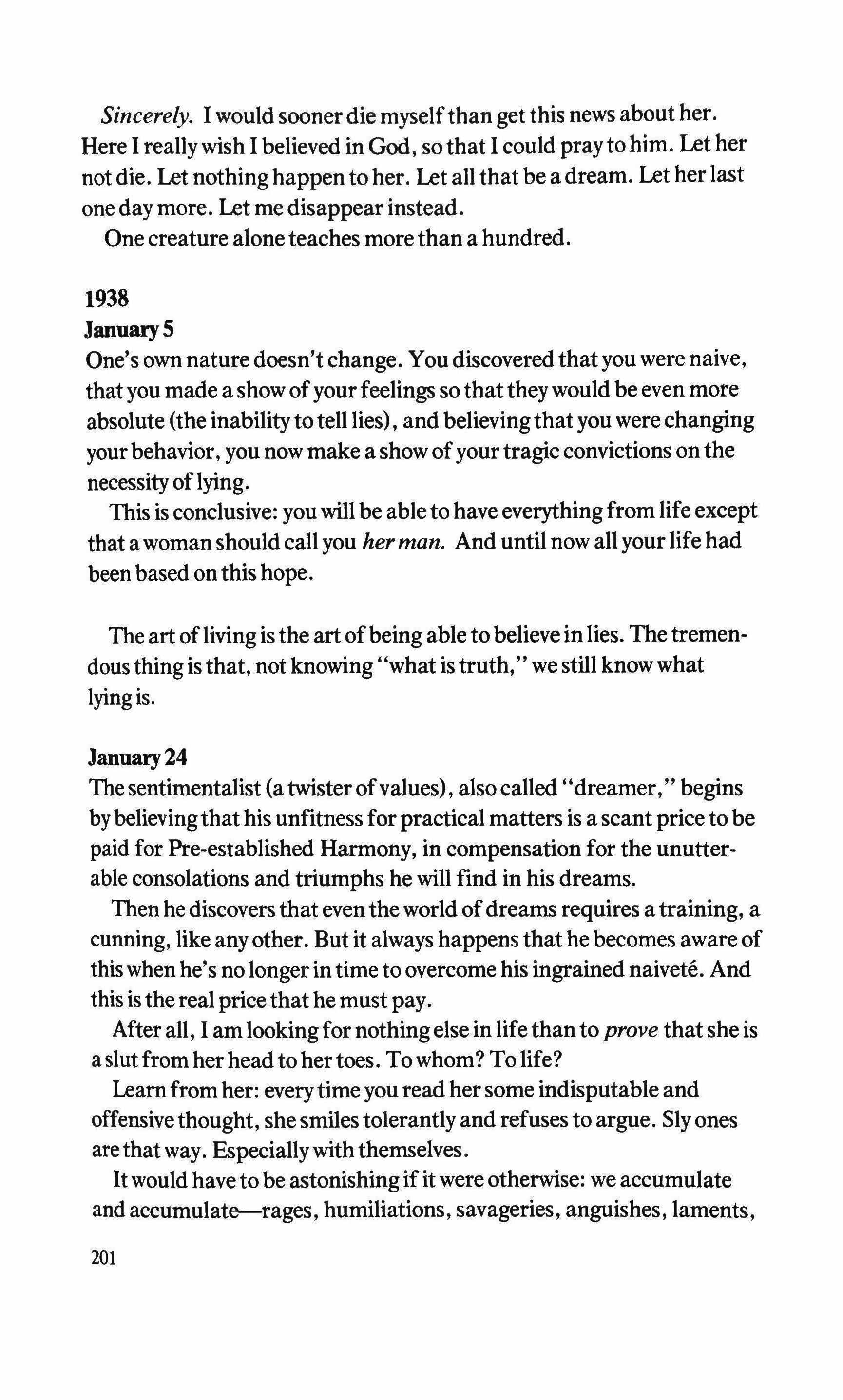
Sincerely. I would sooner die myselfthan get this news about her. Here I reallywish I believed in God, so that I could prayto him. Let her not die. Let nothinghappen to her. Let all that be a dream. Let her last one day more. Let me disappear instead. One creature aloneteaches more than a hundred.
1938
January 5
One's own nature doesn't change. You discovered that you were naive, that you made a show ofyour feelings so that theywould be even more absolute (the inability to tell lies) and believingthat you were changing yourbehavior, you now make a show ofyourtragic convictions on the necessityoflying.
This is conclusive: you will be able to have everythingfrom life except that a woman should call you her man. And until now all your life had been based on this hope.
The art ofliving is the art ofbeing able to believe in lies. The tremendous thing is that, not knowing "what is truth," we still knowwhat lying is.
January 24
The sentimentalist (atwisterofvalues) alsocalled "dreamer," begins bybelievingthat his unfitness forpractical matters is a scant price to be paid for Pre-established Harmony, in compensation for the unutterable consolations and triumphs he will find in his dreams.
Then he discovers that even the world ofdreams requires a training, a cunning, like anyother. But it always happens that he becomes aware of this when he's no longer intime to overcome his ingrained naivete. And this is the real pricethat he must pay.
After all, I am lookingfornothingelse in lifethan to prove that she is aslutfrom her head to her toes. To whom? To life?
Learn from her: everytime you read her some indisputable and offensive thought, she smiles tolerantly and refuses to argue. Sly ones are that way. Especially with themselves. Itwould have to be astonishing if it were otherwise: we accumulate and accumulate-rages, humiliations, savageries, anguishes, laments, 201
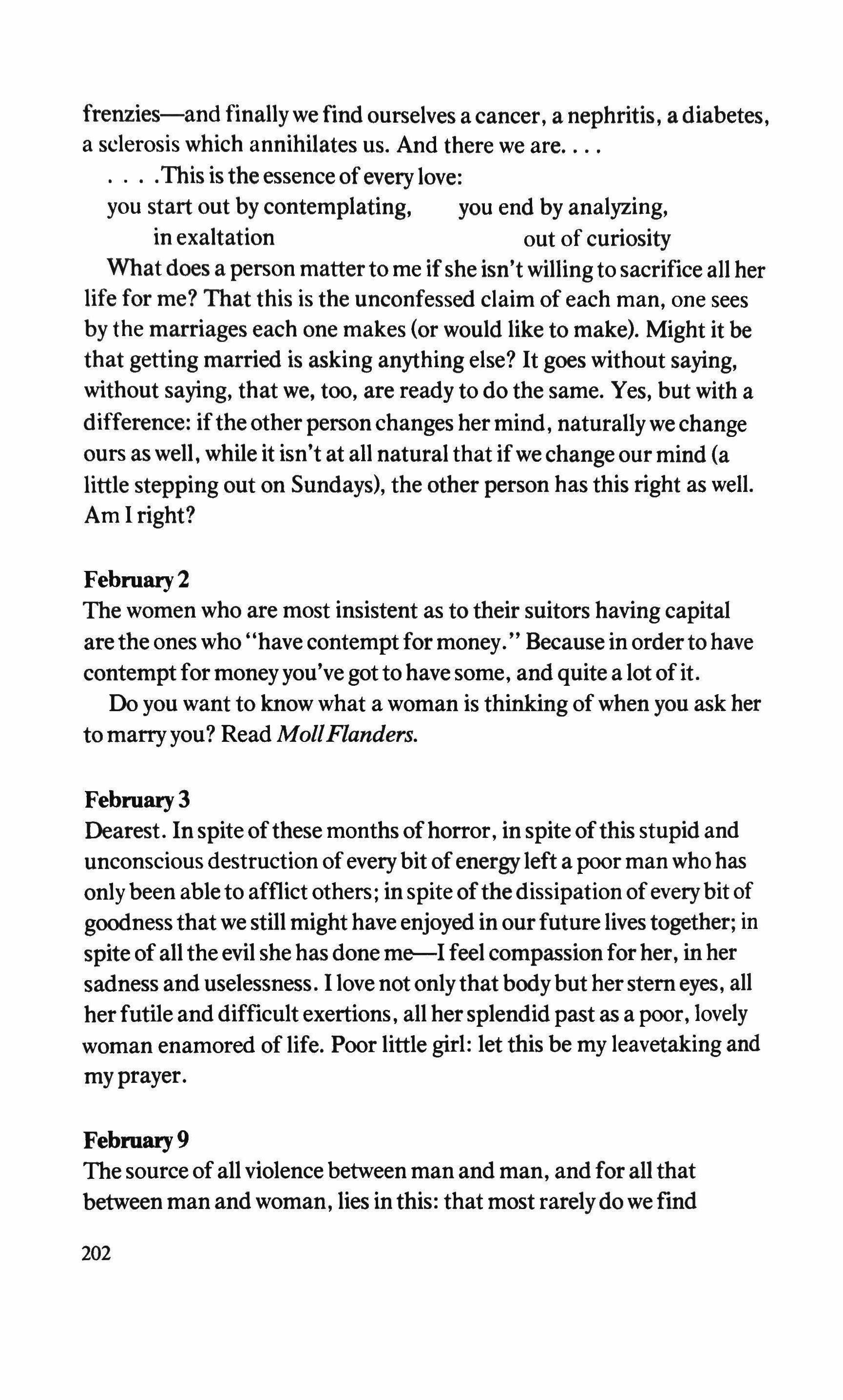
frenzies-and finally we find ourselves a cancer, a nephritis, a diabetes, a sclerosis which annihilates us. And there we are
This is the essence ofevery love: you start out by contemplating, you end by analyzing, in exaltation out of curiosity
What does a person matter to me ifshe isn't willing to sacrifice all her life for me? That this is the unconfessed claim of each man, one sees by the marriages each one makes (or would like to make). Might it be that getting married is asking anything else? It goes without saying, without saying, that we, too, are ready to do the same. Yes, but with a difference: ifthe other person changes her mind, naturally we change ours as well, while it isn't at all natural that if we change our mind (a little stepping out on Sundays), the other person has this right as well. Am I right?
February2
The women who are most insistent as to their suitors having capital are the ones who''have contempt for money." Because in order to have contempt for moneyyou'vegot to have some, and quite a lotofit. Do you want to know what a woman is thinking of when you ask her to marryyou? Read MollFlanders.
February 3
Dearest. In spite ofthese months ofhorror, in spite ofthis stupid and unconscious destruction ofevery bit ofenergyleft a poor man who has onlybeen able to afflict others; in spite ofthedissipation ofeverybit of goodness that we still might have enjoyed in our future lives together; in spite ofall the evil she has done me---I feel compassion forher, in her sadness and uselessness. I love not onlythat bodybut her stern eyes, all herfutile and difficult exertions, all hersplendid past as a poor, lovely woman enamored of life. Poor little girl: let this be my leavetaking and my prayer.
February 9
The source of all violence between man and man, and for all that between man and woman, lies in this: that most rarelydo we find 202
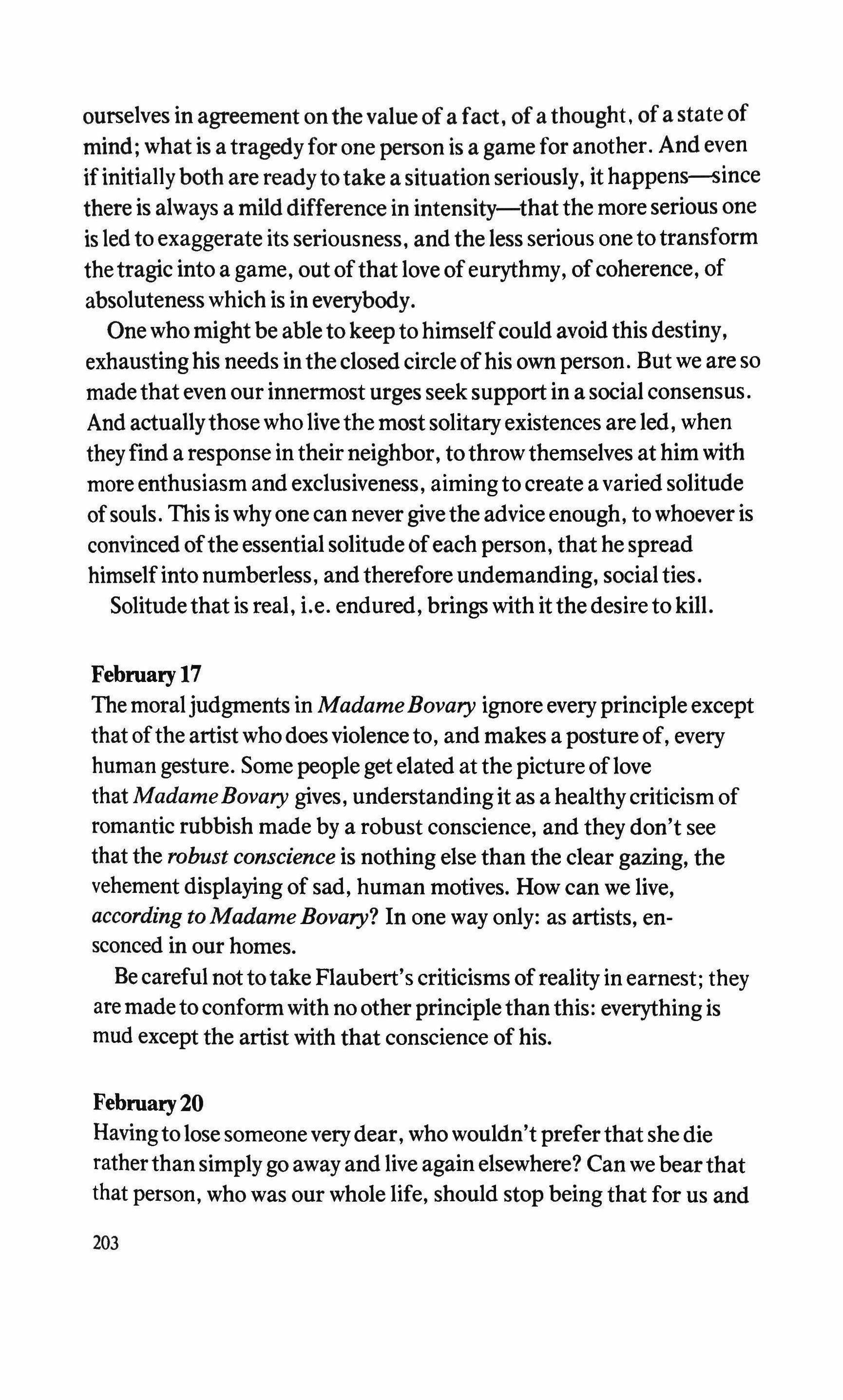
ourselves in agreement on thevalue of a fact, of a thought, of a state of mind; what is a tragedyfor one person is a game for another. And even ifinitiallyboth are readytotake a situation seriously, it happens�ince there is always a mild difference in intensity-thatthe more serious one is led to exaggerate its seriousness, and the less serious one to transform thetragic into a game, out ofthat love ofeurythmy, ofcoherence, of absoluteness which is in everybody.
One who might be able to keep to himselfcould avoid this destiny, exhaustinghis needs in the closed circle ofhis own person. But we are so made that even our innermost urges seek support in a social consensus. And actuallythosewholivethe most solitary existences are led, when theyfind a response in theirneighbor, tothrowthemselves at him with more enthusiasm and exclusiveness, aiming to create a varied solitude ofsouls. This is why one can never givethe advice enough, to whoever is convinced ofthe essential solitude ofeach person, that he spread himselfinto numberless, and therefore undemanding, social ties.
Solitudethat is real, i.e. endured, brings with itthe desire to kill.
February 17
The moraljudgments in MadameBovary ignore every principleexcept that ofthe artist who does violenceto, and makes a postureof, every human gesture. Some people get elated at the picture oflove that MadameBovary gives, understandingit as a healthycriticism of romantic rubbish made by a robust conscience, and they don't see that the robust conscience is nothing else than the clear gazing, the vehement displaying of sad, human motives. How can we live, according to MadameBovary? In one way only: as artists, ensconced in our homes.
Be careful not totake Flaubert's criticisms ofreality in earnest; they are made to conform with no other principle than this: everything is mud except the artist with that conscience of his.
February20
Havingto lose someone verydear, who wouldn't preferthat she die ratherthan simply go away and live againelsewhere? Can we bearthat that person, who was our whole life, should stop being that for us and
203
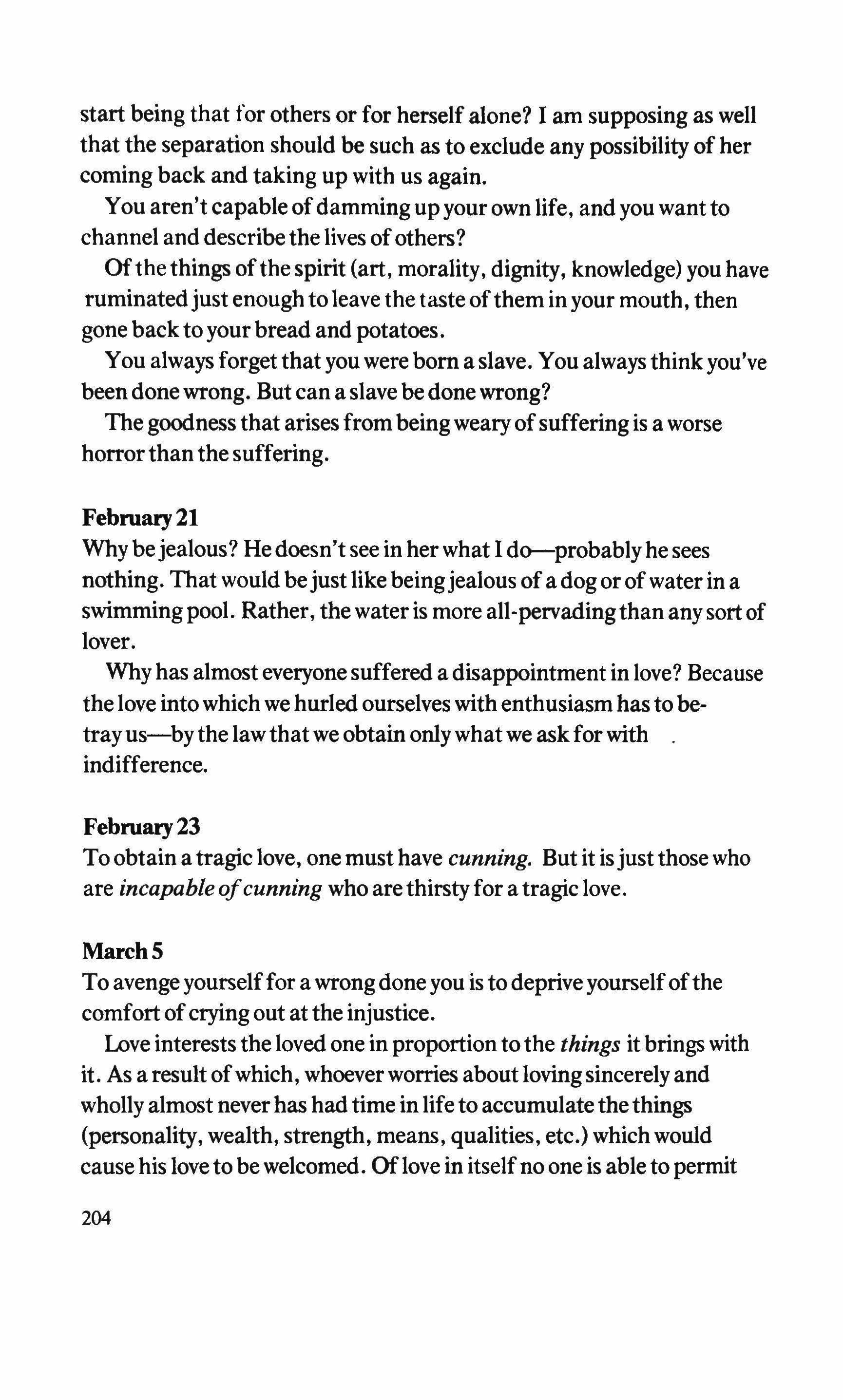
start being that for others or for herself alone? I am supposing as well that the separation should be such as to exclude any possibility of her coming back and taking up with us again.
You aren't capable ofdamming up your own life, and you want to channel and describethe lives ofothers?
Ofthethings ofthe spirit (art, morality, dignity, knowledge) you have ruminatedjustenough to leave the taste ofthem in your mouth, then gone back to yourbread and potatoes.
You alwaysforget that you were born a slave. You always think you've been done wrong. But can a slave be done wrong?
The goodness that arises frombeing weary ofsuffering is a worse horrorthan the suffering.
February 21
Why bejealous? Hedoesn't see in her what I do-probablyhe sees nothing. That would bejust like beingjealous of a dog or ofwater in a swimmingpool. Rather, the water is more all-pervadingthan any sort of lover.
Why has almost everyone suffered a disappointment in love? Because the love intowhich we hurled ourselves with enthusiasm has to betrayus-bythe lawthat we obtain onlywhat we askforwith indifference.
February23
To obtain a tragic love, one must have cunning. But it isjustthose who are incapableofcunning who are thirstyfor a tragic love.
March 5
To avenge yourselffor a wrong done you is to depriveyourselfofthe comfort ofcrying out at the injustice.
Love interests the loved one in proportion to the things it brings with it. As a result ofwhich, whoeverworries about lovingsincerely and wholly almost never has had time in life to accumulate thethings (personality, wealth, strength, means, qualities, etc.) which would cause his loveto bewelcomed. Oflove in itself no one is able to permit
204
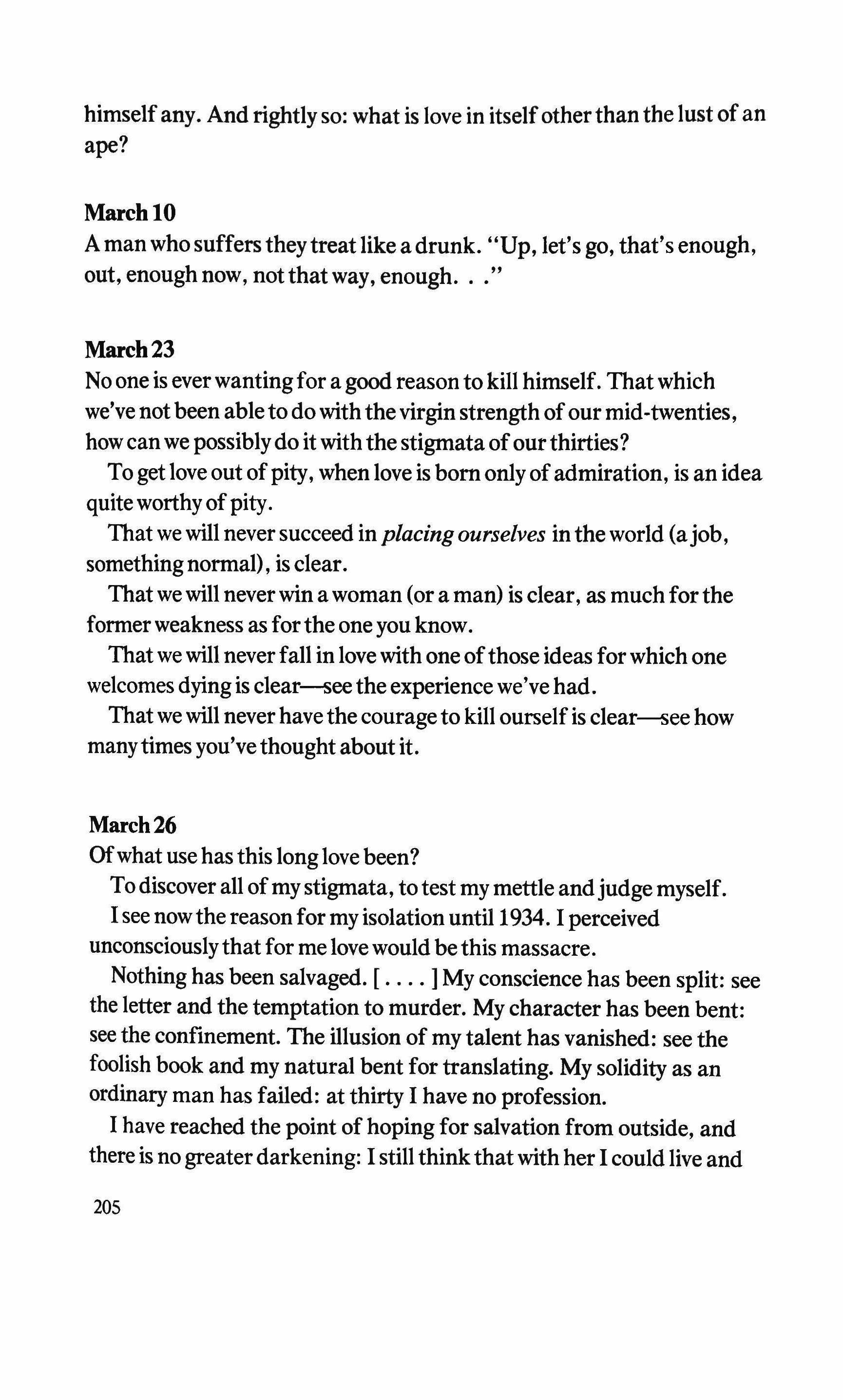
himself any. And rightly so: what is love in itselfotherthan the lust of an ape?
MarchIO
A man who suffers they treat like a drunk. "Up, let's go, that's enough, out, enough now, not that way, enough
March23
No one is ever wantingfor a good reason to kill himself. Thatwhich we've not been ableto do with thevirginstrength of our mid-twenties, how can we possibly do it with the stigmata of our thirties?
To getlove out ofpity, when love is born onlyofadmiration, is an idea quiteworthyofpity.
That we will never succeed in placing ourselves in the world (ajob, somethingnormal), is clear.
That we will never win a woman (or a man) is clear, as much forthe formerweakness as forthe one you know.
That we will never fall in love with one ofthose ideas forwhich one welcomes dying is clear--seethe experiencewe've had.
That we will never havethe courage to kill ourselfis clear--see how manytimes you'vethought about it.
March 26
Ofwhat use has this long love been?
Todiscover all ofmy stigmata, to test my mettle andjudgemyself.
I see now the reason for my isolation until 1934. I perceived unconsciouslythat for me love would be this massacre.
Nothing has been salvaged. [ ] My conscience has been split: see the letter and the temptation to murder. My character has been bent: see the confinement. The illusion of my talent has vanished: see the foolish book and my natural bent for translating. My solidity as an ordinary man has failed: at thirty I have no profession.
I have reached the point of hoping for salvation from outside, and there is no greaterdarkening: I still thinkthat with her I could live and 205
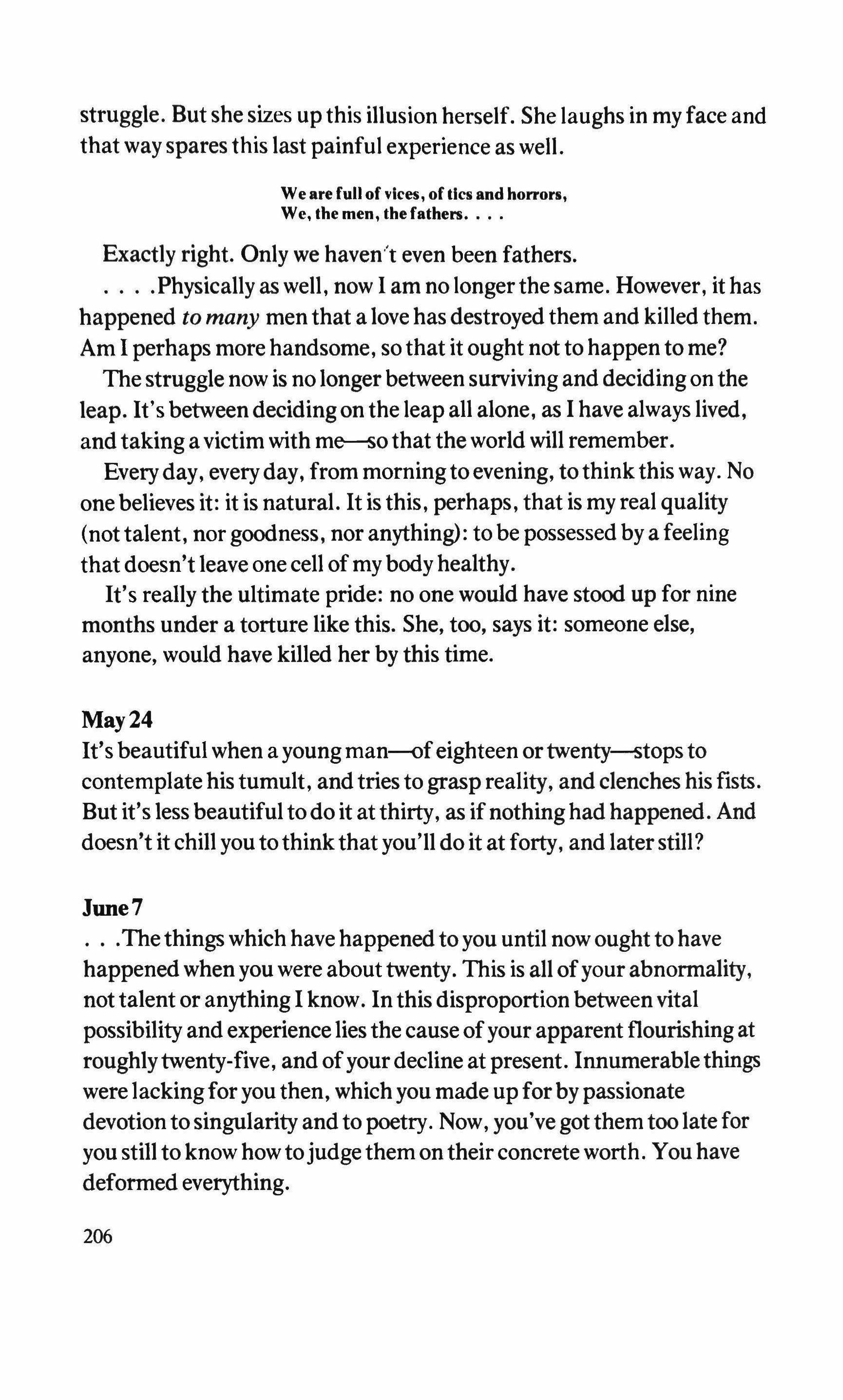
struggle. But she sizes up this illusion herself. She laughs in my face and that way spares this last painful experience as well.
We are full of vices, oftlcs and horrors, We, the men, thefathen
Exactly right. Only we havenit even been fathers
Physically as well, now lam no longerthe same. However, it has happened to many men that a love has destroyed them and killed them. Am I perhaps more handsome, so that it ought not to happen to me?
The struggle now is no longer between surviving and deciding on the leap. It's between deciding on the leap all alone, as I have always lived, and taking a victim with me--so that the world will remember.
Everyday, everyday, from morning to evening, to thinkthis way. No one believes it: it is natural. It is this, perhaps, that is my real quality (not talent, nor goodness, nor anything): to be possessedby a feeling that doesn't leave one cell of mybodyhealthy.
It's really the ultimate pride: no one would have stood up for nine months under a torture like this. She, too, says it: someone else, anyone, would have killed her by this time.
May24
It's beautiful when a young man-ofeighteen or twenty-stops to contemplate his tumult, and tries to grasp reality, and clenches his fists. But it's less beautiful to do it atthirty, as ifnothinghad happened. And doesn't it chill you to thinkthat you'll do it at forty, and laterstill?
June7
The things which have happened to you until now ought to have happened when you were about twenty. This is all ofyour abnormality, not talent or anything I know. In this disproportion between vital possibility and experiencelies the cause ofyour apparent flourishing at roughlytwenty-five, and ofyour decline at present. Innumerablethings were lackingfor you then, which you made up forbypassionate devotion to singularity and to poetry. Now, you'vegot them too late for you still to know how tojudge them on their concrete worth You have deformed everything.
206

Naturally, however, ifthis disproportion has occurred, it didn't arise by chance, but from your initial deafness and the dispersion which twisted your values at about twenty and caused you to seek unusual things in a way that was unusually wrong. Because he who seeks finds, and experiences move mainly from within, and we have the love affairs we choose to have Death is repose, but the thought of death is what troubles every repose.
I am at least eight years behind mycontemporaries. As a rulethey are alreadyconvinced at twenty-two ofwhat still doesn't convince me at thirty.
It's ridiculous to supposethat one's vital relations with a person can ever change.
207
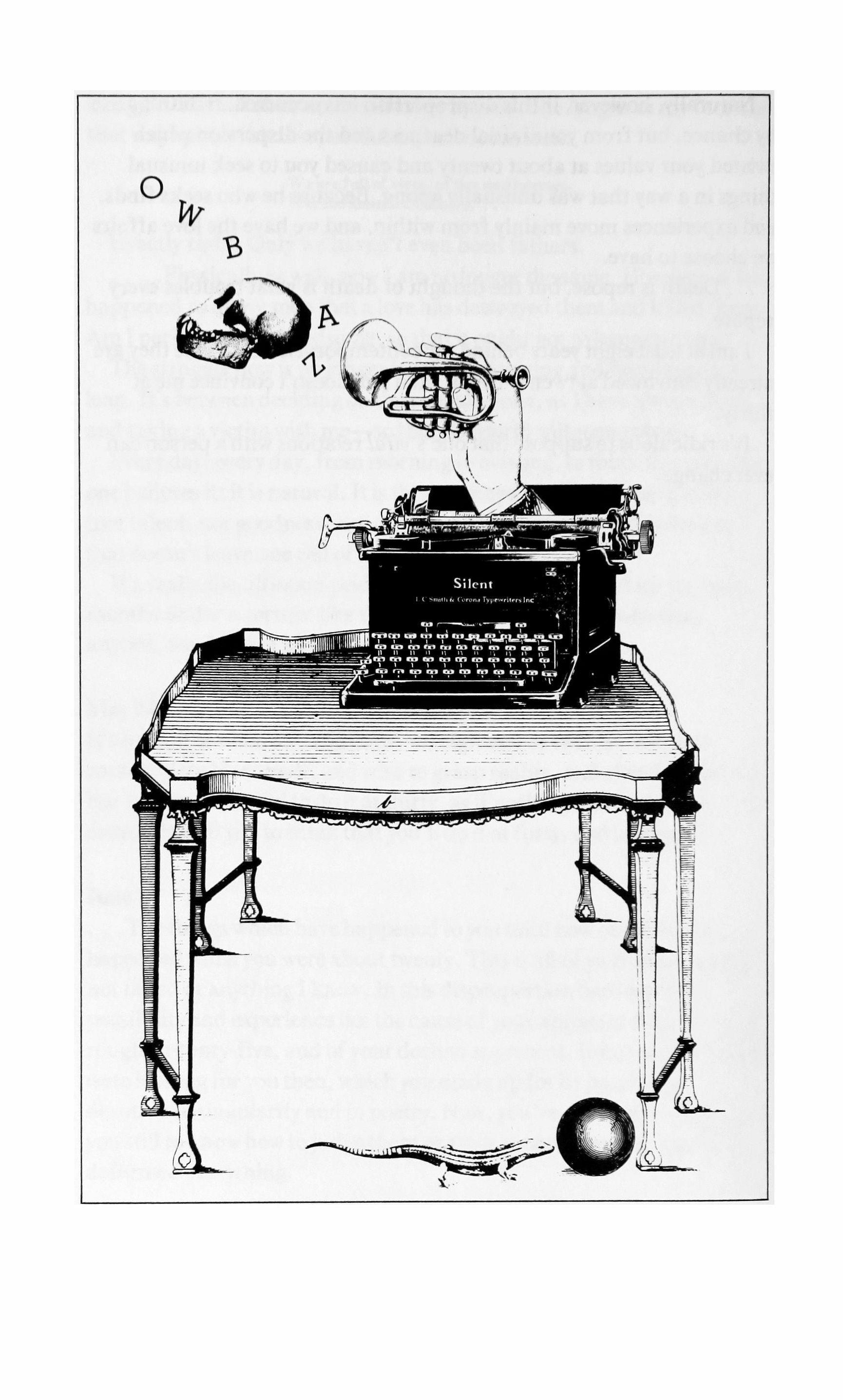
o W
The self-conscious moment: reflections on the aftermath ofmodernism
Robert Alter
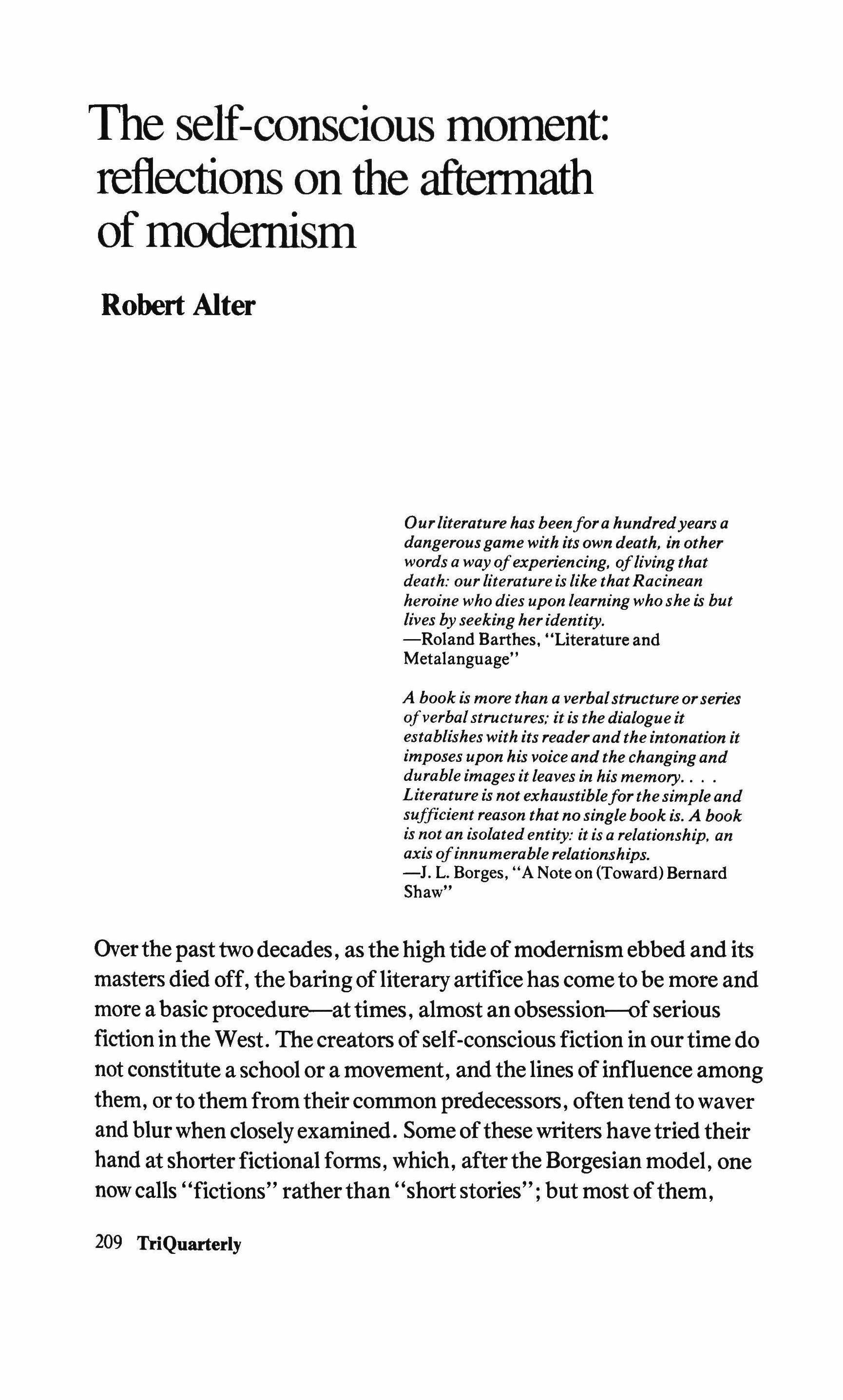
Ourliterature has beenfor a hundredyears a dangerousgame with its own death, in other words a way ofexperiencing, ofliving that death: our literature is like thatRacinean heroine who dies upon learning who she is but lives byseeking heridentity.
-Roland Barthes, "Literature and Metalanguage"
A book is more than a verbalstructure orseries ofverbalstructures: it is the dialogue it establishes with its readerand the intonation it imposes upon his voice and the changingand durable images it leaves in his memory Literature is not exhaustibleforthe simpleand sufficient reason that no single book is. A book is not an isolatedentity: it is a relationship, an axis ofinnumerable relationships.
-J. L. Borges, "A Note on (Toward) Bernard Shaw"
Overthe pasttwo decades, as thehightide ofmodernism ebbed and its masters died off, thebaring ofliteraryartifice has come to be more and more a basic procedure-attimes, almost an obsession--ofserious fiction inthe West. The creators ofself-conscious fiction in our time do not constitute a school or a movement, andthe lines ofinfluence among them, or to them from their common predecessors, often tend to waver and blur when closelyexamined. Some ofthese writers have tried their hand at shorterfictional forms, which, afterthe Borgesianmodel, one now calls "fictions" ratherthan "shortstories"; but most ofthem,
209 TriQuarterly
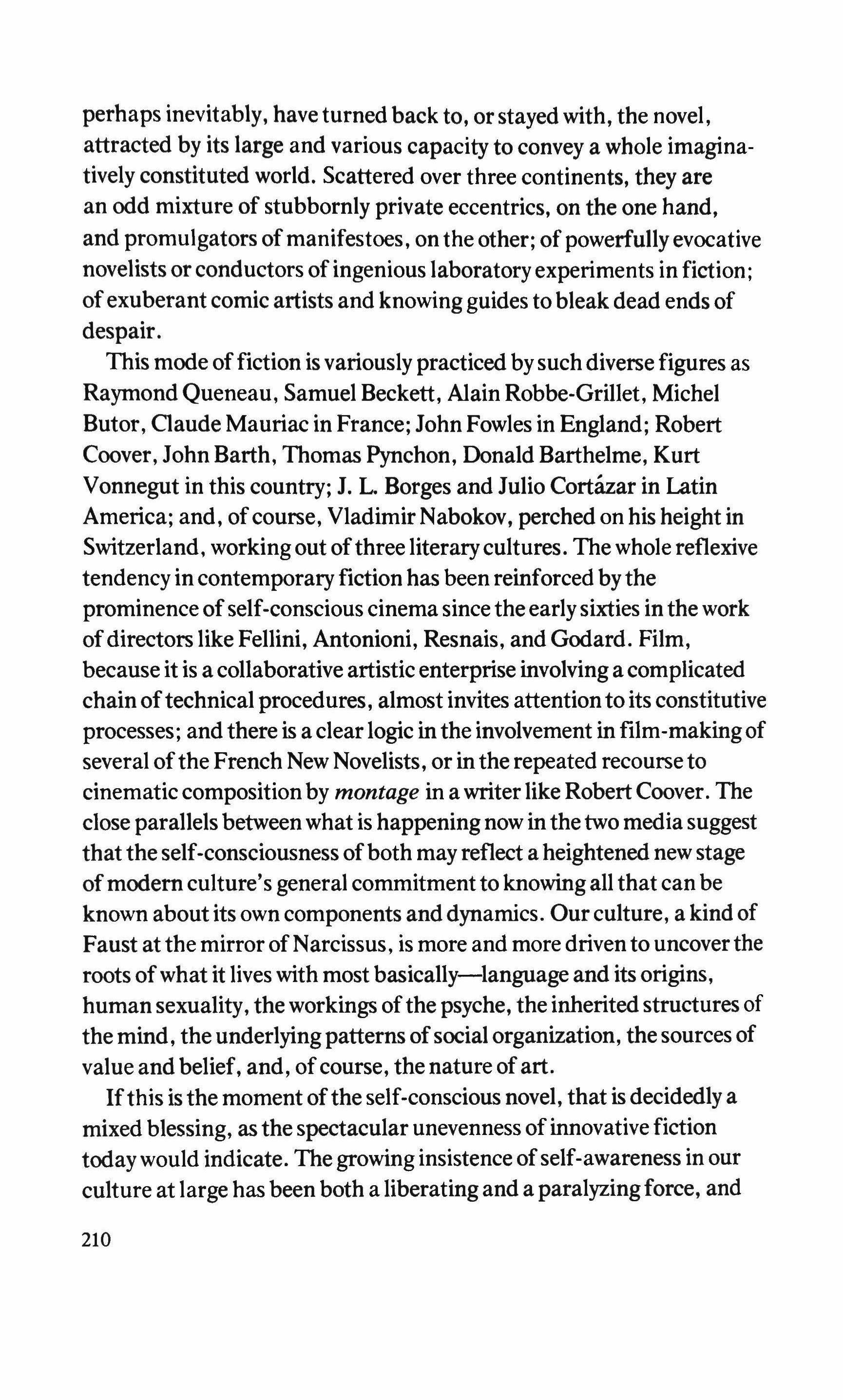
perhaps inevitably, have turned back to, or stayed with, the novel, attracted by its large and various capacity to convey a whole imaginatively constituted world. Scattered over three continents, they are an odd mixture of stubbornly private eccentrics, on the one hand, and promulgators ofmanifestoes, on the other; ofpowerfullyevocative novelists or conductors ofingenious laboratoryexperiments in fiction; ofexuberant comic artists and knowingguides to bleak dead ends of despair.
This mode offiction is variouslypracticedbysuch diverse figures as Raymond Queneau, Samuel Beckett, Alain Robbe-Grillet, Michel Butor, Claude Mauriac in France; John Fowles in England; Robert Coover, John Barth, Thomas Pynchon, Donald Barthelme, Kurt Vonnegut in this country; 1. L Borges and Julio Cortazar in Latin America; and, of course, Vladimir Nabokov, perched on his height in Switzerland, working out ofthree literarycultures. The whole reflexive tendency incontemporaryfiction has been reinforced bythe prominence ofself-conscious cinema since theearlysixties in the work ofdirectors like Fellini, Antonioni, Resnais, and Godard. Film, because it is a collaborative artistic enterpriseinvolving a complicated chain oftechnical procedures, almost invites attention to its constitutive processes; and there is a clear logic inthe involvement in film-makingof several ofthe French New Novelists, or in the repeated recourse to cinematic compositionby montage in a writer like Robert Coover. The close parallels betweenwhat is happening now inthe two media suggest that the self-consciousness ofboth may reflect a heightened new stage ofmodern culture's general commitment to knowingall that can be known about its own components and dynamics. Our culture, a kind of Faust at the mirror ofNarcissus, is more and more driven to uncover the roots ofwhat it lives with most basically-language and its origins, human sexuality, the workings ofthe psyche, the inherited structures of the mind, the underlyingpatterns ofsocial organization, the sources of value and belief, and, ofcourse, the nature ofart.
Ifthis is the moment ofthe self-conscious novel, that is decidedly a mixed blessing, as the spectacular unevenness of innovative fiction todaywould indicate. The growing insistence ofself-awareness in our culture at large has been both a liberating and a paralyzingforce, and
210
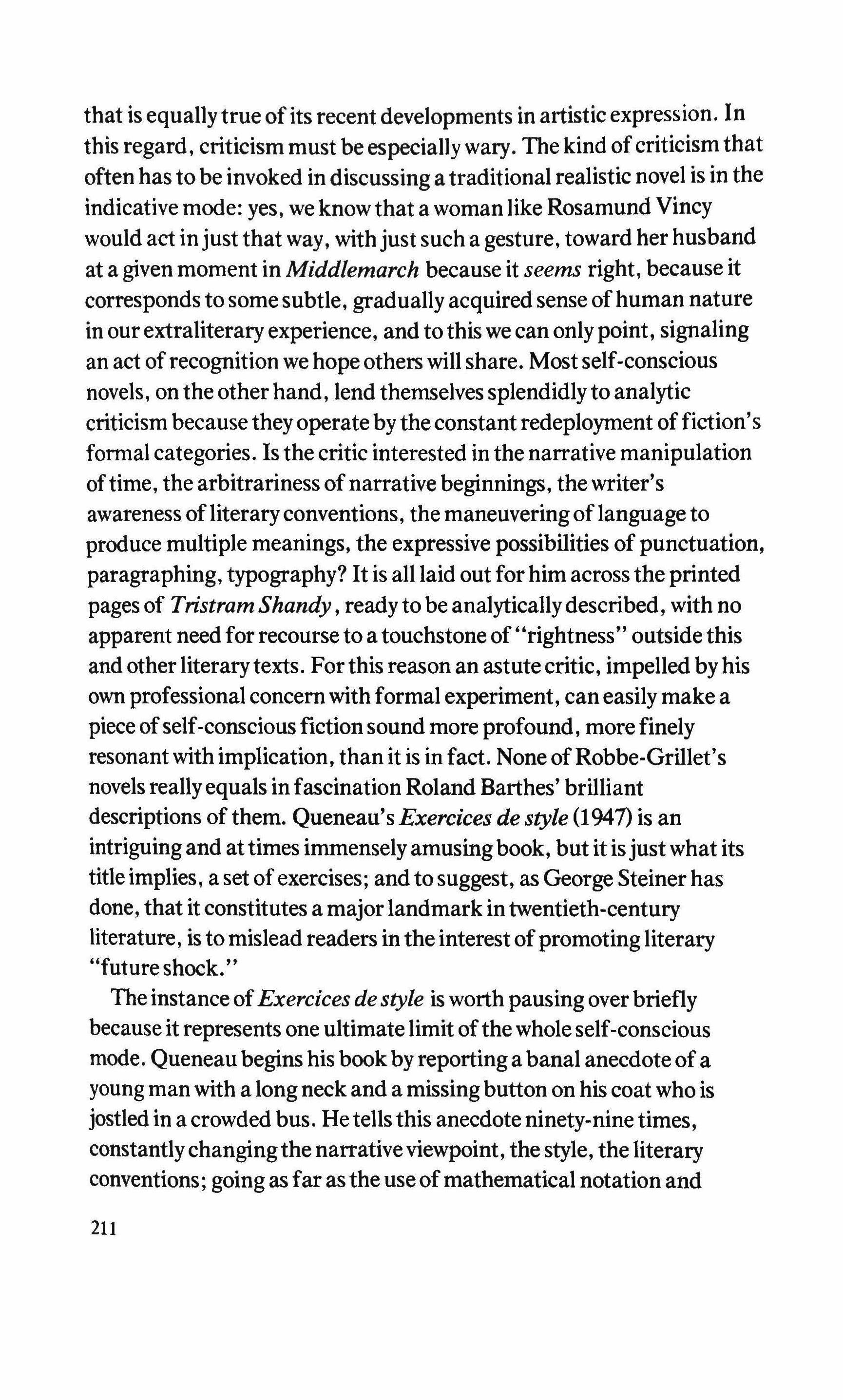
that is equally true ofits recent developments in artistic expression. In this regard, criticism must be especially wary. The kind ofcriticism that often has to be invoked in discussing a traditional realistic novel is in the indicative mode: yes, we know that a woman like Rosamund Viney would act injustthat way, withjust such a gesture, toward her husband at a given moment in Middlemarch because it seems right, because it corresponds to some subtle, graduallyacquired sense ofhuman nature in our extraliteraryexperience, and to this we can onlypoint, signaling an act ofrecognition we hope others will share. Most self-conscious novels, on the other hand, lend themselves splendidly to analytic criticism becausetheyoperatebythe constant redeployment offiction's formal categories. Is the critic interested in the narrative manipulation oftime, the arbitrariness of narrative beginnings, the writer's awareness ofliteraryconventions, the maneuveringoflanguage to produce multiple meanings, the expressive possibilities of punctuation, paragraphing, typography? It is all laid out forhim across the printed pages of Tristram Shandy,ready to be analyticallydescribed, with no apparent need for recourse to a touchstone of"rightness" outside this and other literary texts. Forthis reason an astute critic, impelled byhis own professional concern with formal experiment, can easily make a piece ofself-conscious fiction sound more profound, more finely resonant with implication, than it is in fact. None ofRobbe-Grillet's novels reallyequals infascination Roland Barthes' brilliant descriptions of them. Queneau's Exercices de style (1947) is an intriguing and at times immenselyamusingbook, but it isjust what its title implies, a set ofexercises; and to suggest, as George Steiner has done, that it constitutes a majorlandmark in twentieth-century literature, is to mislead readers in the interest ofpromotingliterary "futureshock."
The instanceofExercices destyle is worth pausing over briefly because it represents one ultimate limit ofthe whole self-conscious mode. Queneaubegins his bookbyreporting a banal anecdote of a young man with a long neck and a missing button on his coat who is jostled in a crowded bus. He tells this anecdote ninety-ninetimes, constantlychangingthe narrativeviewpoint, the style, the literary conventions; going as far as the use ofmathematical notation and
211
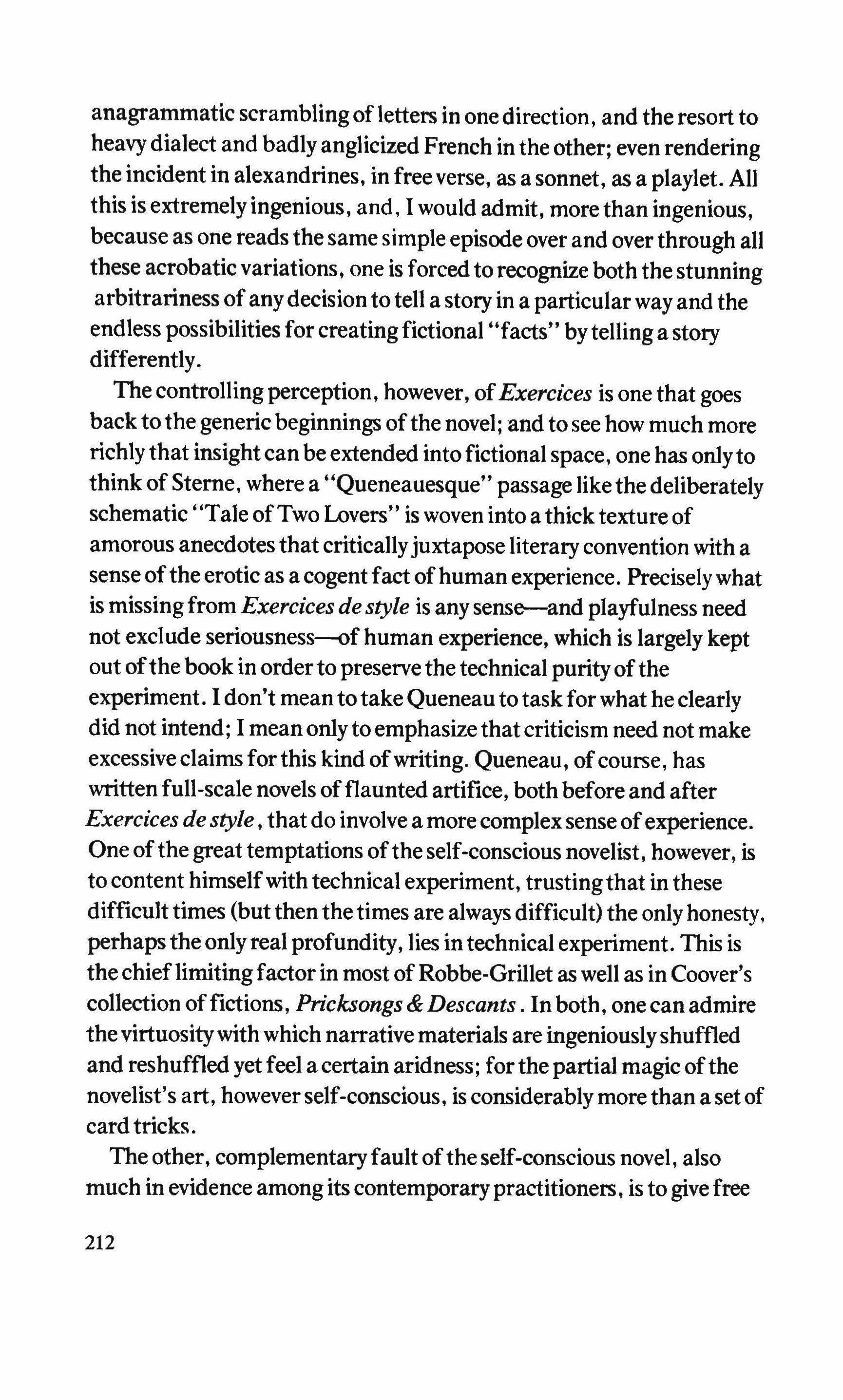
anagrammaticscramblingofletters in one direction, and the resort to heavy dialect and badlyanglicized French in the other; even rendering the incident in alexandrines, in free verse, as a sonnet, as a playlet. All this is extremelyingenious, and, I would admit, more than ingenious, because as one reads the same simpleepisode over and over through all these acrobaticvariations, one is forced to recognize both the stunning arbitrariness ofanydecision to tell a story in a particular way and the endless possibilities for creating fictional "facts" bytelling a story differently.
The controllingperception, however, ofExercices is one that goes back to the genericbeginnings ofthe novel; and to see how much more richly that insight can be extended into fictional space, one has only to think of Sterne. where a "Queneauesque" passage like the deliberately schematic "Tale ofTwo Lovers" is woven into a thick texture of amorous anecdotes that criticallyjuxtaposeliterary convention with a sense ofthe erotic as a cogent fact of human experience. Precisely what is missingfrom Exercices de style is anysense-and playfulness need not exclude seriousness=-of human experience, which is largely kept out ofthe book in order to preserve the technical purityofthe experiment. I don't mean to take Queneau to task for what he clearly did not intend; I mean onlyto emphasizethatcriticism need not make excessive claims forthis kind ofwriting. Queneau, ofcourse, has written full-scale novels offlaunted artifice. both before and after Exercices de style, that do involve a more complex sense ofexperience. One ofthe greattemptations ofthe self-conscious novelist, however, is to content himselfwith technical experiment, trustingthat in these difficult times (butthen thetimes are always difficult) the onlyhonesty, perhaps the only real profundity, lies in technical experiment. This is the chieflimitingfactor in most of Robbe-Grillet as well as in Coover's collection offictions, Pricksongs & Descants. Inboth, one can admire thevirtuositywith which narrative materials are ingeniouslyshuffled and reshuffled yet feel a certain aridness; for the partial magic ofthe novelist's art, howeverself-conscious, is considerably more than a set of cardtricks.
The other. complementaryfault oftheself-conscious novel, also much in evidence among its contemporary practitioners, is to give free
212
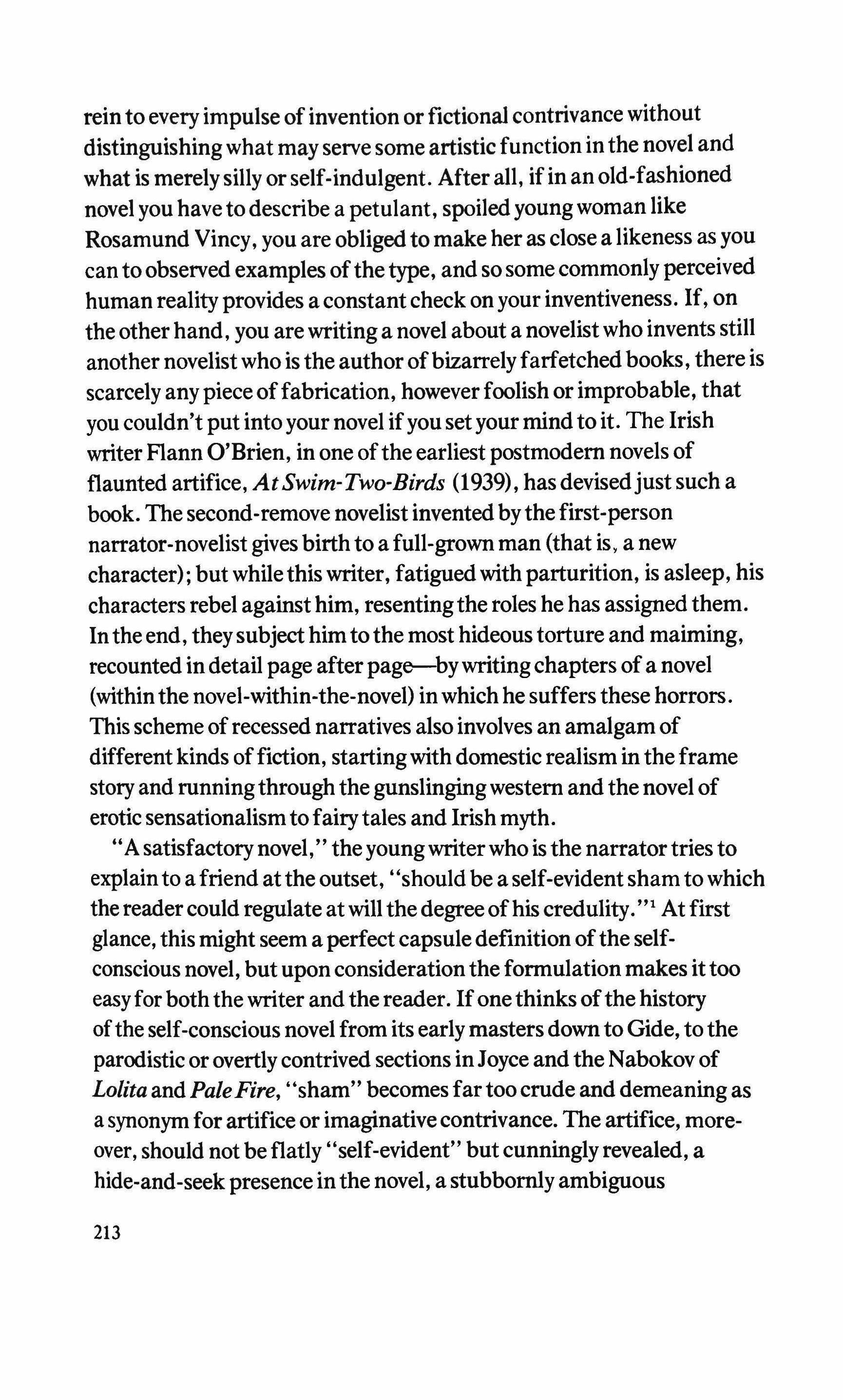
rein to every impulse ofinvention or fictional contrivance without distinguishingwhat may serve some artistic function in the novel and what is merelysilly or self-indulgent. After all, ifin an old-fashioned novel you have todescribe a petulant, spoiledyoung woman like Rosamund Viney, you are obliged to make her as close a likeness as you can to observed examples ofthe type, and so some commonlyperceived human realityprovides a constant check on your inventiveness. If, on the other hand, you are writing a novel about a novelist who invents still another novelist who is the author ofbizarrely farfetched books, there is scarcely any pieceoffabrication, howeverfoolish or improbable, that you couldn't put into your novel ifyou setyour mind to it. The Irish writer Flann O'Brien, in one ofthe earliest postmodern novels of flaunted artifice, AtSwim-Two-Birds (1939), has devisedjust such a book. The second-remove novelist inventedbythefirst-person narrator-novelist gives birth to a full-grown man (that is, a new character); but whilethis writer, fatiguedwith parturition, is asleep, his characters rebel against him, resentingthe roles he has assigned them. Inthe end, theysubject him to the most hideous torture and maiming, recounted indetail page after page-bywritingchapters of a novel (withinthe novel-within-the-novel) inwhichhe suffers these horrors. This scheme ofrecessed narratives also involves an amalgam of different kinds offiction, startingwith domestic realism in theframe story and runningthrough the gunslingingwestern and the novel of erotic sensationalism to fairy tales and Irish myth.
A satisfactorynovel," the youngwriterwho is the narrator tries to explain to a friend at the outset, "should be a self-evident sham to which the reader could regulate at will the degreeofhis credulity. "1 At first glance, this might seem a perfectcapsuledefinition ofthe selfconscious novel, but upon considerationthe formulation makes it too easyfor boththe writer and the reader. If one thinks ofthe history ofthe self-conscious novel from its early masters down to Gide, to the parodistic or overtly contrived sections inJoyce and the Nabokov of Lolita and PaleFire, "sham" becomes far too crude and demeaning as a synonym for artifice or imaginative contrivance. The artifice, moreover, should not be flatly "self-evident" but cunninglyrevealed, a hide-and-seek presence inthe novel, a stubbornlyambiguous
213
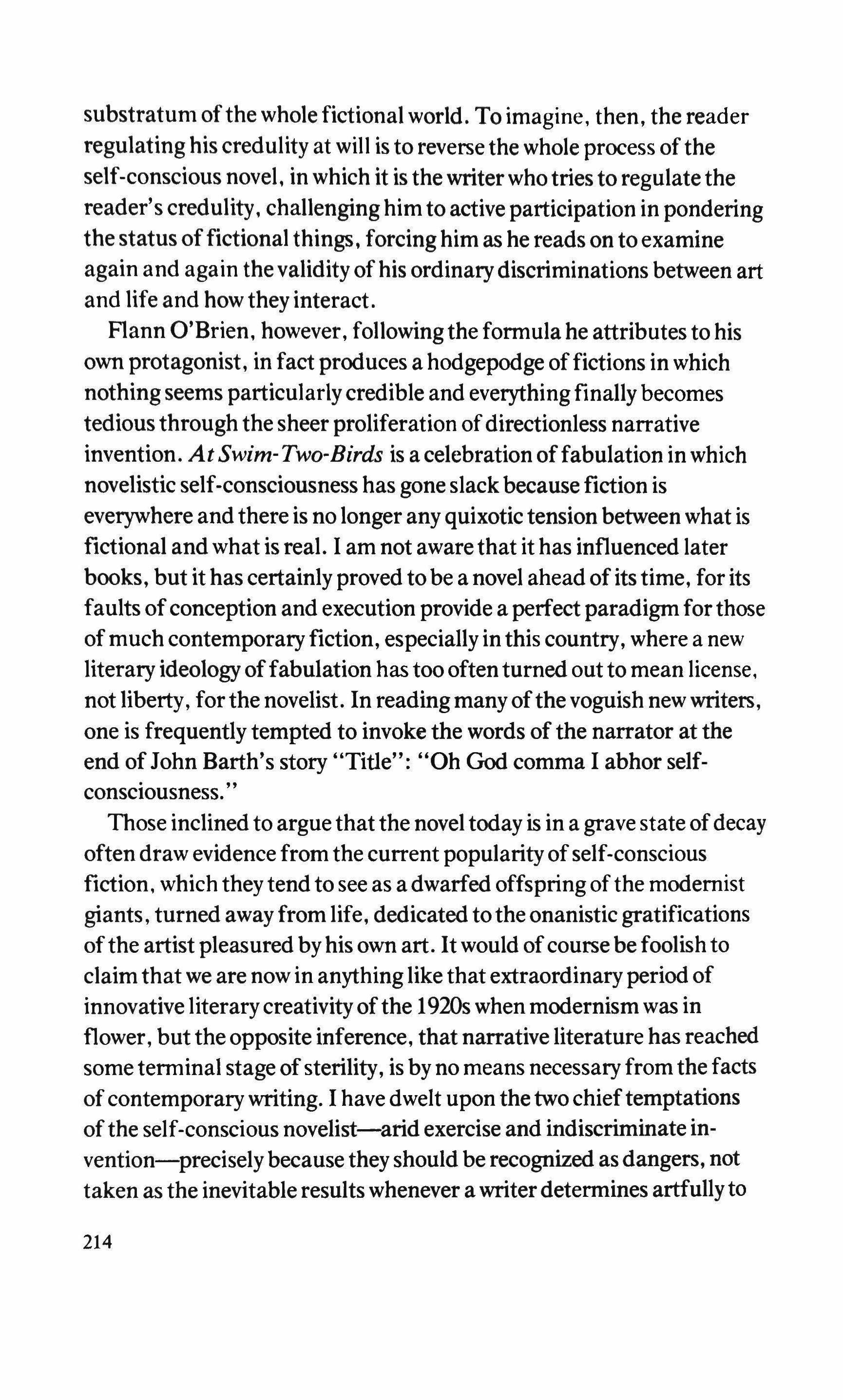
substratum ofthe whole fictional world. To imagine, then, the reader regulating his credulity at will is to reverse the whole process ofthe self-conscious novel. in which it is the writerwho tries to regulate the reader's credulity. challenginghim to active participation in pondering the status offictional things. forcinghim as he reads on to examine again and again thevalidity ofhis ordinarydiscriminations between art and life and how they interact.
Flann O'Brien. however. followingthe formula he attributes to his own protagonist. in fact produces a hodgepodge offictions in which nothing seems particularlycredible and everythingfinally becomes tedious through the sheer proliferation ofdirectionless narrative invention. AtSwim-Two-Birds is a celebration offabulation in which novelistic self-consciousness has gone slack because fiction is everywhere and there is no longer any quixotic tension between what is fictional and what is real. I am not aware that it has influenced later books, but it has certainlyproved to be a novel ahead ofits time, for its faults ofconception and execution provide a perfectparadigm forthose ofmuch contemporaryfiction, especially in this country, where a new literaryideology offabulation has too often turned out to mean license, not liberty, forthe novelist. In reading many ofthe voguish new writers, one is frequentlytempted to invoke the words of the narrator at the end of John Barth's story "Title": "Oh God comma I abhor selfconsciousness.
Those inclined to argue that the novel today is in a grave state ofdecay often draw evidence from the current popularity ofself-conscious fiction, which theytend to see as a dwarfed offspring of the modernist giants, turned away from life, dedicated tothe onanistic gratifications ofthe artist pleasuredbyhis own art. It would of course be foolish to claim that we are now in anything like that extraordinaryperiod of innovative literarycreativity ofthe 1920s when modernism was in flower, but the opposite inference, that narrative literature has reached some terminal stage ofsterility, is by no means necessary from the facts ofcontemporary writing. I have dwelt upon the two chieftemptations ofthe self-conscious novelist-arid exercise and indiscriminate invention-preciselybecause they should be recognized as dangers, not taken as the inevitable results whenever a writer determines artfullyto
214
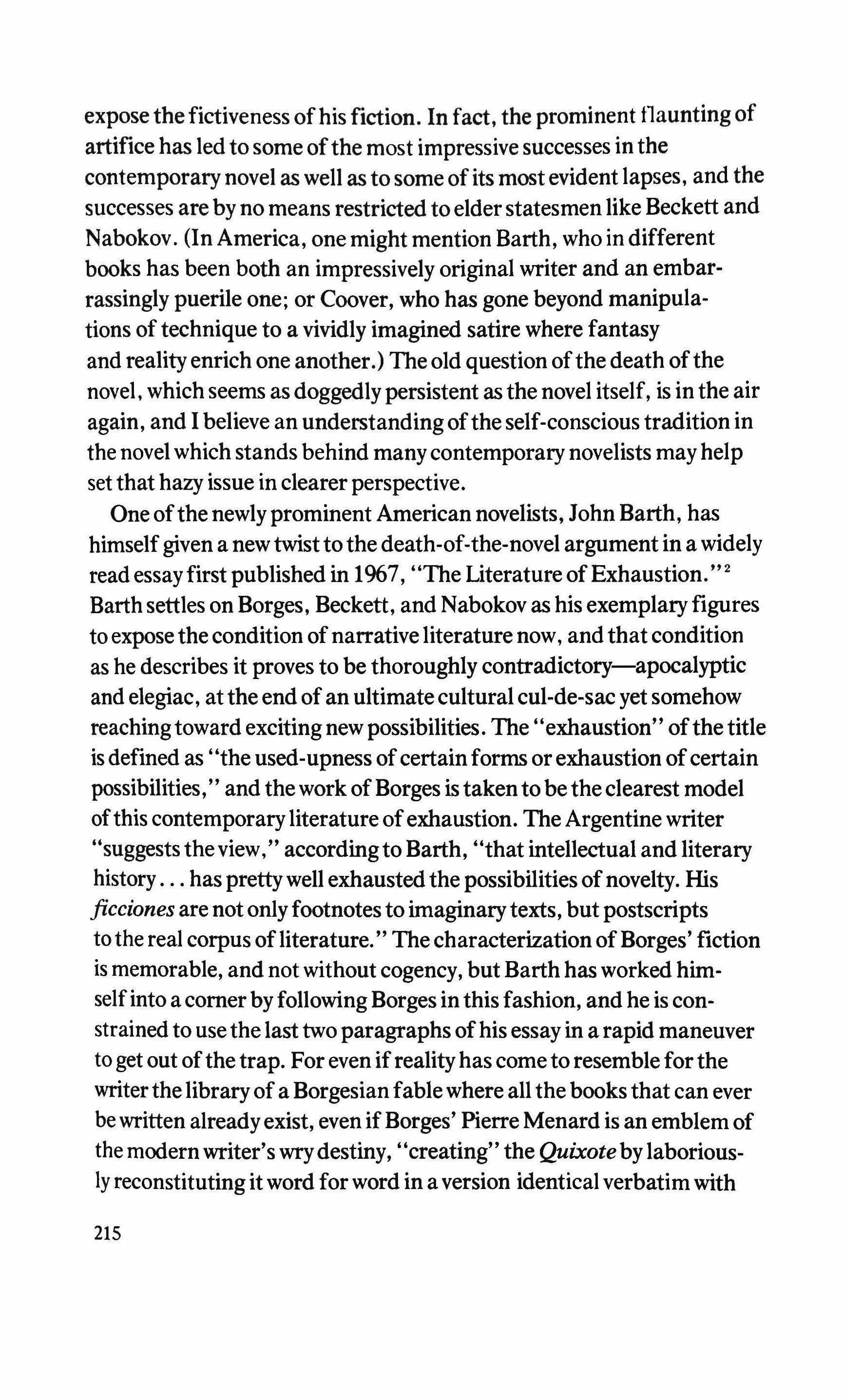
expose thefictiveness ofhis fiction. In fact, the prominent flaunting of artifice has led to some ofthe most impressive successes in the contemporary novel as well as to some ofits most evident lapses, and the successes are by no means restricted to elder statesmen like Beckett and Nabokov. (In America, one might mention Barth, who in different books has been both an impressively original writer and an embarrassingly puerile one; or Coover, who has gone beyond manipulations of technique to a vividly imagined satire where fantasy and reality enrich one another.) The old question ofthe death ofthe novel, which seems as doggedlypersistent as the novel itself, is in the air again, and I believe an understandingofthe self-conscious tradition in the novelwhich stands behind many contemporary novelists may help set that hazy issue in clearer perspective.
One ofthe newlyprominent American novelists, John Barth, has himselfgiven a new twist to the death-of-the-novel argument in a widely read essayfirst published in 1967, "The Literature ofExhaustion." 2 Barth settles on Borges, Beckett, and Nabokov as his exemplaryfigures to expose the condition ofnarrativeliterature now, and that condition as he describes it proves to be thoroughlycontradictory-apocalyptic and elegiac, at the end of an ultimatecultural cul-de-sac yet somehow reachingtoward exciting new possibilities. The "exhaustion" ofthe title is defined as "the usedupness ofcertain forms or exhaustion ofcertain possibilities," and the work ofBorges is taken to be theclearest model ofthis contemporary literature ofexhaustion. The Argentine writer "suggests theview," accordingto Barth, "that intellectual and literary history has prettywell exhaustedthe possibilities ofnovelty. His ficciones are not onlyfootnotes to imaginary texts, but postscripts to the real corpus ofliterature." The characterization ofBorges' fiction is memorable, and not without cogency, but Barth has worked himselfinto a comer byfollowingBorges inthis fashion, and he is constrained to use the last two paragraphs ofhis essay in a rapid maneuver to get out ofthe trap. For even ifreality has come to resemble for the writerthelibrary of a Borgesianfable where all the books that can ever be written alreadyexist, even ifBorges' Pierre Menard is an emblem of the modern writer's wrydestiny, "creating" the Quixotebylaboriouslyreconstitutingitword for word in a version identical verbatimwith
215
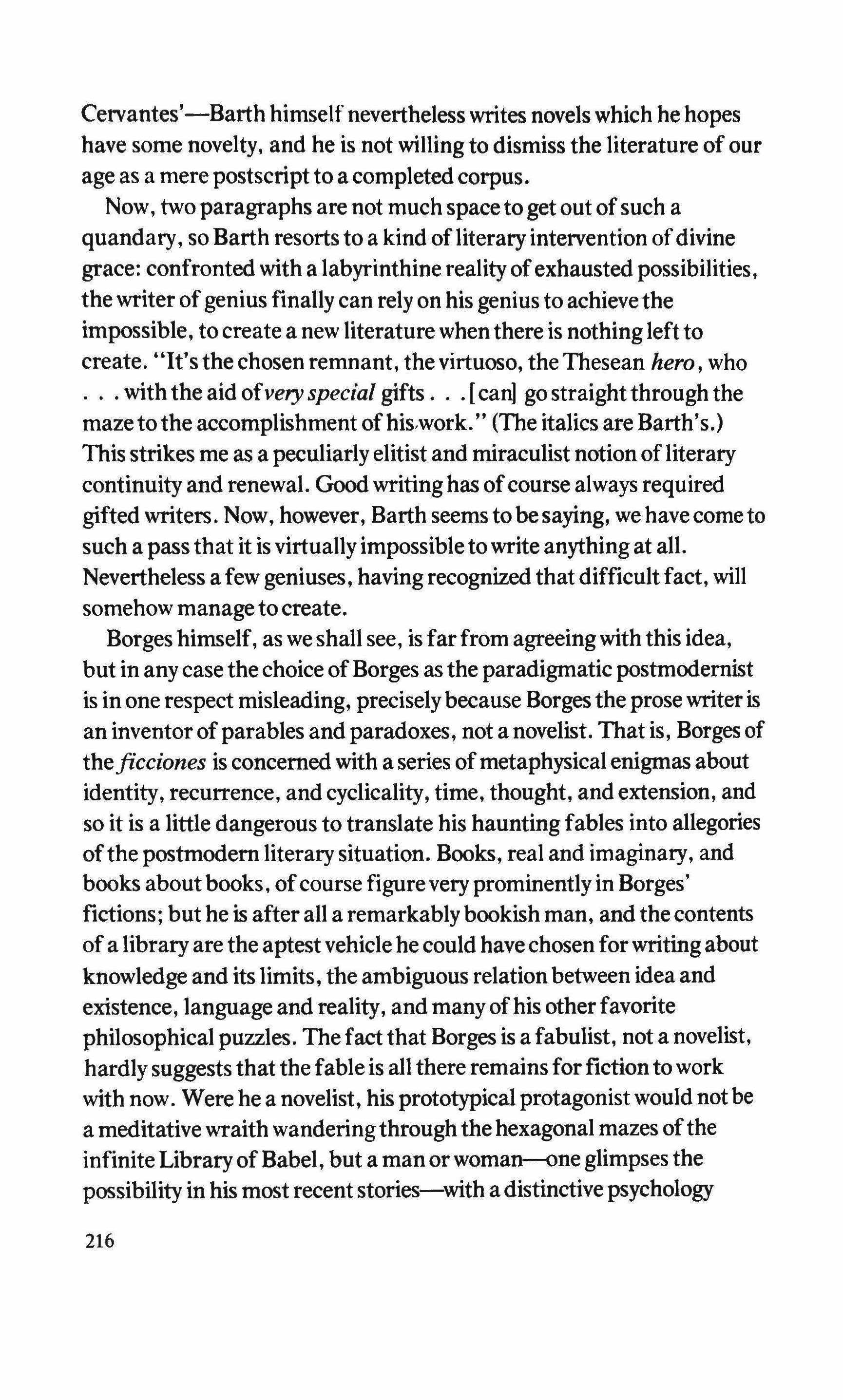
Cervantes'-Barth himself nevertheless writes novels which he hopes have some novelty, and he is not willing to dismiss the literature of our age as a mere postscript to a completed corpus.
Now, two paragraphs are not much spaceto get out ofsuch a quandary, so Barth resorts to a kind ofliterary intervention ofdivine grace: confronted with a labyrinthinereality ofexhausted possibilities, thewriter of genius finally can rely on his genius to achievethe impossible, to create a new literature when there is nothing left to create. "It's the chosen remnant, the virtuoso, the Thesean hero, who with the aid ofvery special gifts. [can) go straightthrough the maze to the accomplishment ofhis.work. (The italics are Barth's.) This strikes me as a peculiarly elitist and miraculist notion ofliterary continuity and renewal. Good writing has of course always required gifted writers. Now, however, Barth seems to be saying, we have come to such a pass that it is virtuallyimpossible to write anything at all. Nevertheless a few geniuses, havingrecognized that difficult fact, will somehow manage to create.
Borges himself, as we shall see, is farfrom agreeingwith this idea, but in any case the choice ofBorges as the paradigmaticpostmodernist is in one respect misleading, preciselybecause Borges the prose writer is an inventor ofparables and paradoxes, not a novelist. That is, Borges of theficciones is concerned with a series ofmetaphysicalenigmas about identity, recurrence, and cyclicality, time, thought, and extension, and so it is a little dangerous to translate his haunting fables into allegories ofthe postmodernliterary situation. Books, real and imaginary, and books aboutbooks, of course figure very prominently in Borges' fictions; but he is after all a remarkablybookish man, and the contents of a library are the aptestvehicle he could have chosen forwritingabout knowledge and its limits, the ambiguous relation between idea and existence, language and reality, and many ofhis other favorite philosophicalpuzzles. The fact that Borges is a fabulist, not a novelist, hardlysuggests that the fable is all there remains forfiction to work with now. Were he a novelist, his prototypicalprotagonist would not be a meditative wraith wanderingthrough thehexagonal mazes ofthe infinite Library ofBabel, but a man or woman-one glimpses the possibility in his most recent stories-with a distinctive psychology
216
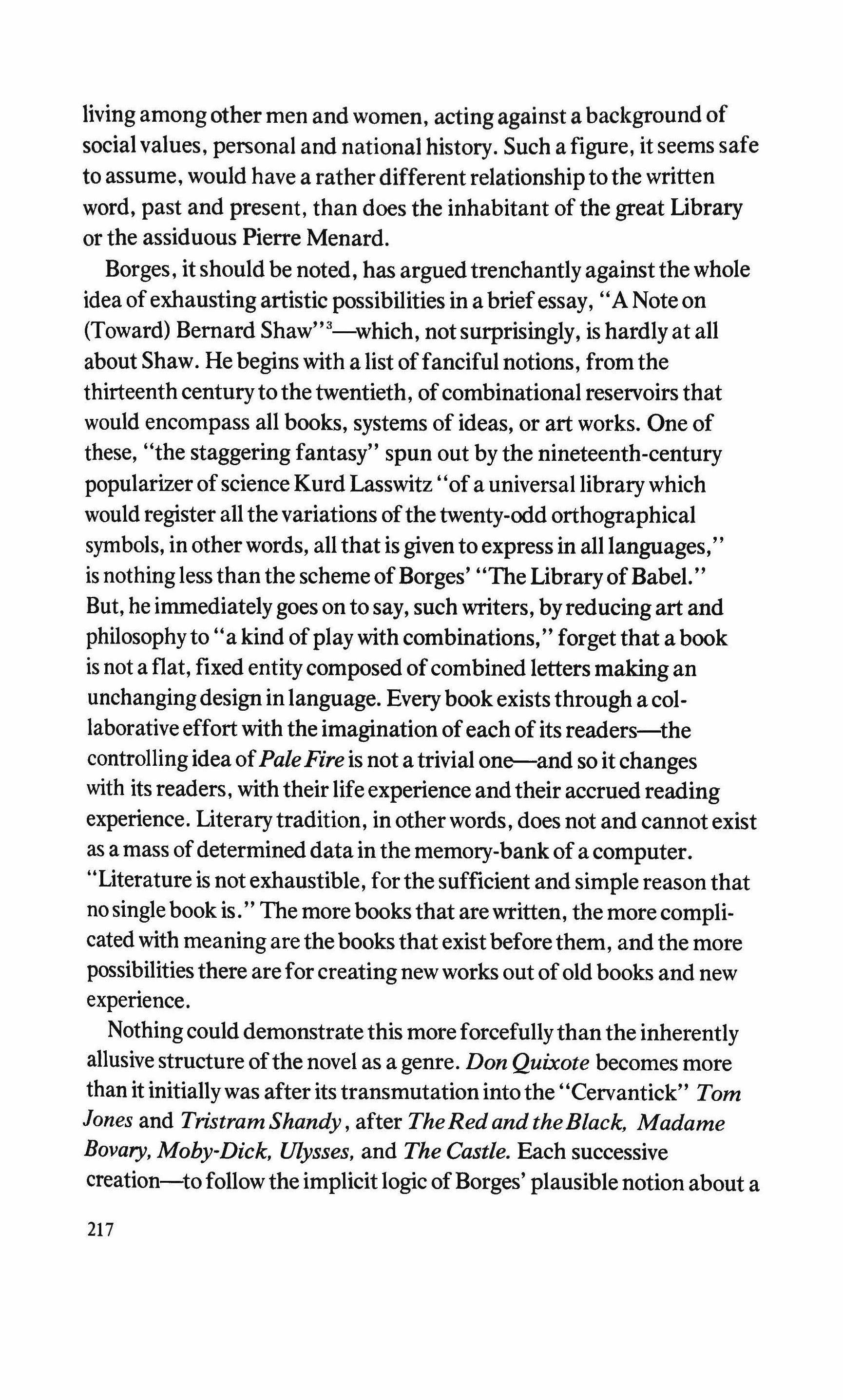
living among other men and women, actingagainst a background of social values, personal and national history. Such a figure, it seems safe to assume, would have a rather different relationship to the written word, past and present, than does the inhabitant of the great Library or the assiduous Pierre Menard.
Borges, it should be noted, has arguedtrenchantlyagainst the whole idea ofexhausting artistic possibilities in a briefessay, "A Note on (Toward) Bernard Shaw'v=which, not surprisingly, is hardly at all about Shaw. He begins with a list offanciful notions, from the thirteenth centuryto the twentieth, ofcombinational reservoirs that would encompass all books, systems of ideas, or art works. One of these, "the staggering fantasy" spun out by the nineteenth-century popularizer ofscience Kurd Lasswitz "of a universal library which would register all the variations ofthe twenty-oddorthographical symbols, in otherwords, all that is given to express in all languages, is nothing less than the scheme of Borges' "The Library ofBabel." But, he immediately goes on to say, such writers, byreducing art and philosophy to" a kind ofplay with combinations," forget that a book is not a flat, fixed entitycomposed ofcombined letters making an unchangingdesign in language. Every book exists through a collaborative effort with the imagination ofeach ofits readers-the controlling idea ofPaleFireis not a trivial one-s-and so it changes with its readers, with their life experience and their accrued reading experience. Literarytradition, in other words, does not and cannot exist as a mass ofdetermined datainthe memory-bank of a computer. "Literature is not exhaustible, forthe sufficient and simple reason that no singlebook is." The more books that are written, the more complicated with meaning are the books that exist before them, and the more possibilitiesthere are for creating new works out ofold books and new experience.
Nothingcould demonstrate this more forcefullythan the inherently allusive structure ofthe novel as a genre. Don Quixote becomes more than it initially was after its transmutation intothe "Cervantick" Tom Jones and Tristram Shandy, after TheRed and theBlack, Madame Bovary, Moby-Dick, Ulysses, and The Castle. Each successive creation-to followthe implicitlogic ofBorges' plausible notion about a 217
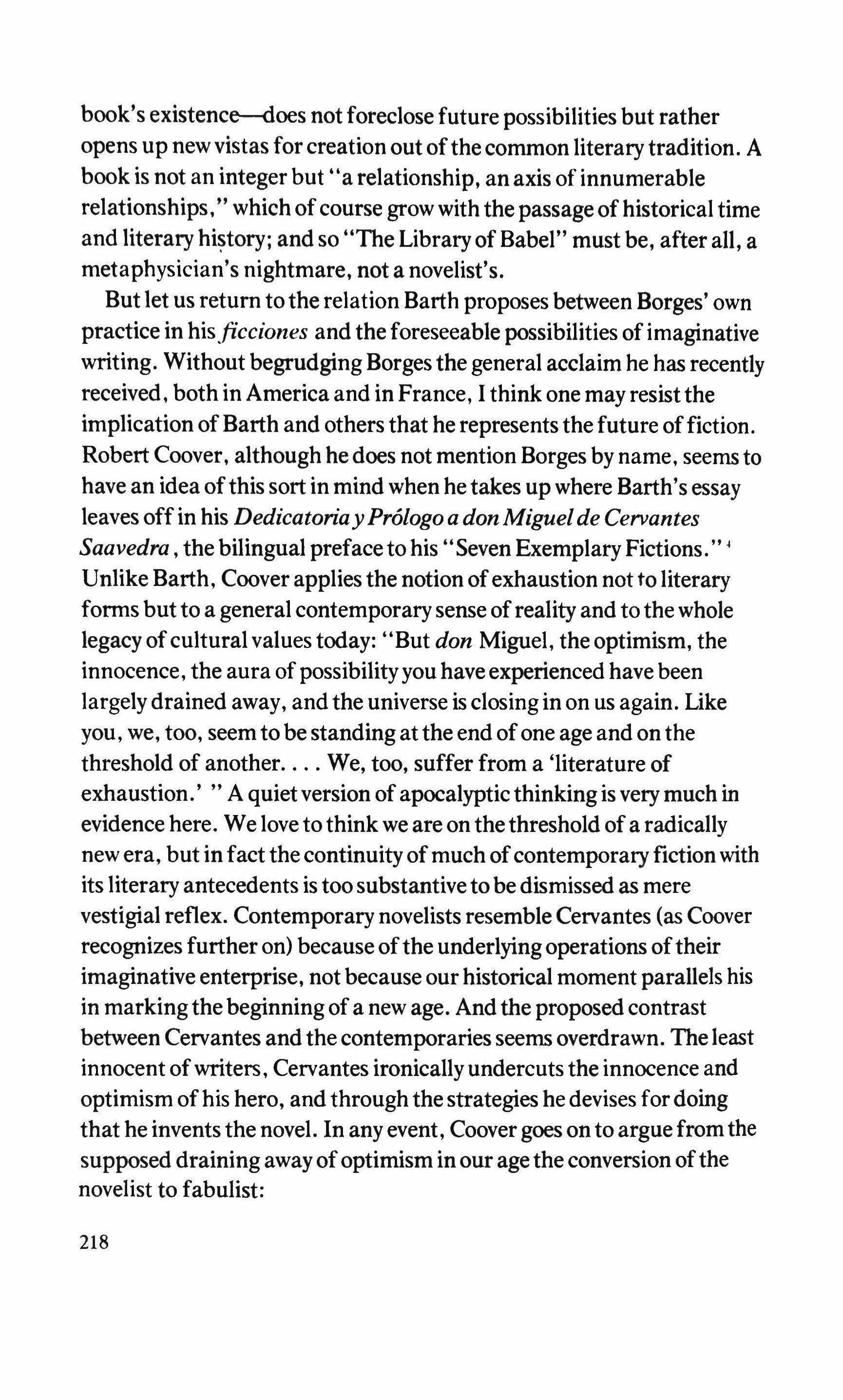
book's existence--does not foreclose future possibilities but rather opens up new vistas forcreation out ofthe common literary tradition. A book is not an integer but •. a relationship, an axis of innumerable relationships," which of course growwith the passage of historical time and literaryhistory; and so "The Libraryof Babel" must be, after all, a metaphysician's nightmare, not a novelist's.
But let us return to the relation Barth proposes between Borges' own practice in hisficciones and the foreseeable possibilities ofimaginative writing. Without begrudgingBorges the general acclaim he has recently received, both in America and in France, I think one may resistthe implication ofBarth and others that he represents the future offiction. Robert Coover, although he does not mention Borges by name, seems to have an idea ofthis sort in mind when he takes up where Barth's essay leaves offin his DedicatoriayPrologo a don Miguelde Cervantes Saavedra, the bilingualpreface to his "Seven Exemplary Fictions." Unlike Barth, Coover applies the notion ofexhaustion not to literary forms but to a general contemporary sense ofreality and to the whole legacy ofcultural values today: "But don Miguel, the optimism, the innocence, the aura ofpossibilityyou have experienced have been largely drained away, and the universe is closingin on us again. Like you, we, too, seem to be standing at the end of one age and on the threshold of another We, too, suffer from a 'literature of exhaustion.' A quietversion ofapocalypticthinkingis verymuch in evidence here. We love to think we are on thethreshold of a radically new era, but in fact thecontinuityofmuch ofcontemporary fictionwith its literary antecedents is too substantive to be dismissed as mere vestigial reflex. Contemporary novelists resemble Cervantes (as Coover recognizes further on) because ofthe underlyingoperations oftheir imaginativeenterprise, not because our historical moment parallels his in marking thebeginning of a new age. And the proposed contrast between Cervantes and the contemporaries seems overdrawn. The least innocent ofwriters, Cervantes ironicallyundercuts the innocence and optimism ofhis hero, and through the strategies he devises fordoing that he invents the novel. In any event, Coover goes on to argue fromthe supposed draining away ofoptimism in our age the conversion ofthe novelist to fabulist:
218
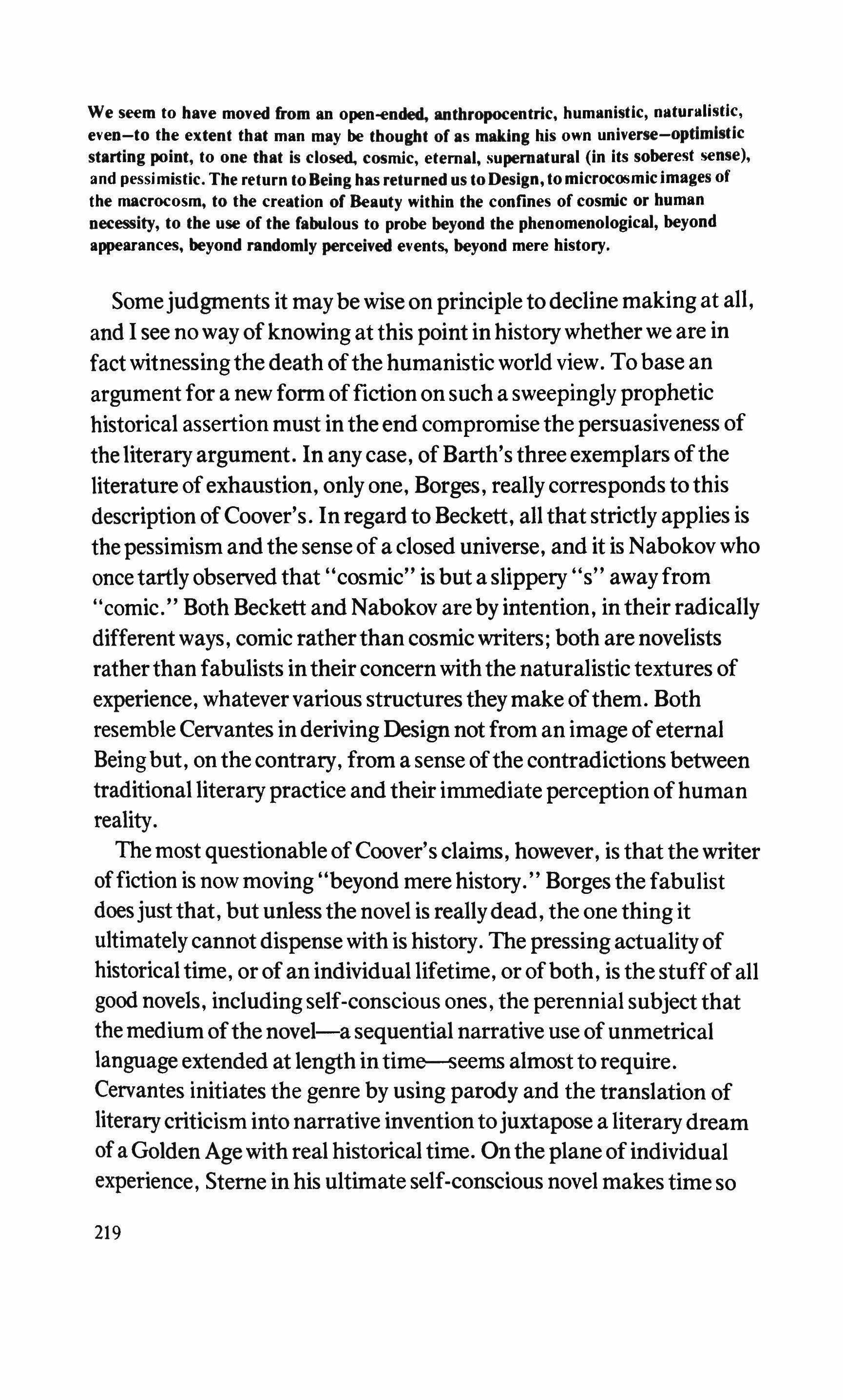
We seem to have moved from an open-ended, anthropocentric, humanistic, naturalistic, even-to the extent that man may be thought of as mailing his own universe-optimistic starting point, to one that is closed, cosmic, eternal, supernatural (in its soberest sense), and pessimistic. The return to Being has returned us to Design,lo microcosmicimages of the macrocosm, to the creation of Beauty within the confines of cosmic or human necessity, to tbe use of the fabulous to probe beyond the phenomenological, beyond appearances, beyond randomly perceived events, beyond mere history.
Somejudgments it maybe wise on principle to decline making at all, and I see no way ofknowing at this point in historywhether we are in fact witnessingthe death ofthe humanistic world view. Tobase an argument for a new form offiction on such a sweepinglyprophetic historical assertion must in theend compromise the persuasiveness of theliteraryargument. In any case, of Barth's three exemplars ofthe literature ofexhaustion, only one, Borges, reallycorresponds to this description ofCoover's. In regard to Beckett, all that strictly applies is thepessimism and the sense of a closed universe, and it is Nabokov who once tartly observed that "cosmic" is but a slippery "s" away from "comic." Both Beckett and Nabokov are byintention, in their radically different ways, comic ratherthan cosmicwriters; both are novelists ratherthan fabulists intheir concern withthe naturalistic textures of experience, whatevervarious structures they make ofthem. Both resemble Cervantes inderivingDesign not from an image ofeternal Beingbut, on the contrary, from a sense ofthe contradictions between traditional literarypractice and their immediate perception ofhuman reality.
The most questionable of Coover's claims, however, is that the writer offiction is now moving"beyond mere history." Borges the fabulist doesjustthat, but unless the novel is reallydead, the one thing it ultimately cannot dispense with is history. The pressingactuality of historical time, or of an individual lifetime, or ofboth is the stuffof all good novels, including self-conscious ones, the perennialsubject that the medium ofthe novel-asequential narrative use ofunmetrical language extended at length intime=seems almost to require. Cervantes initiates the genre by using parody and the translation of literarycriticism into narrative invention tojuxtapose a literarydream of a Golden Agewith real historical time. Onthe plane ofindividual experience, Sterne in his ultimate self-conscious novel makes time so
219
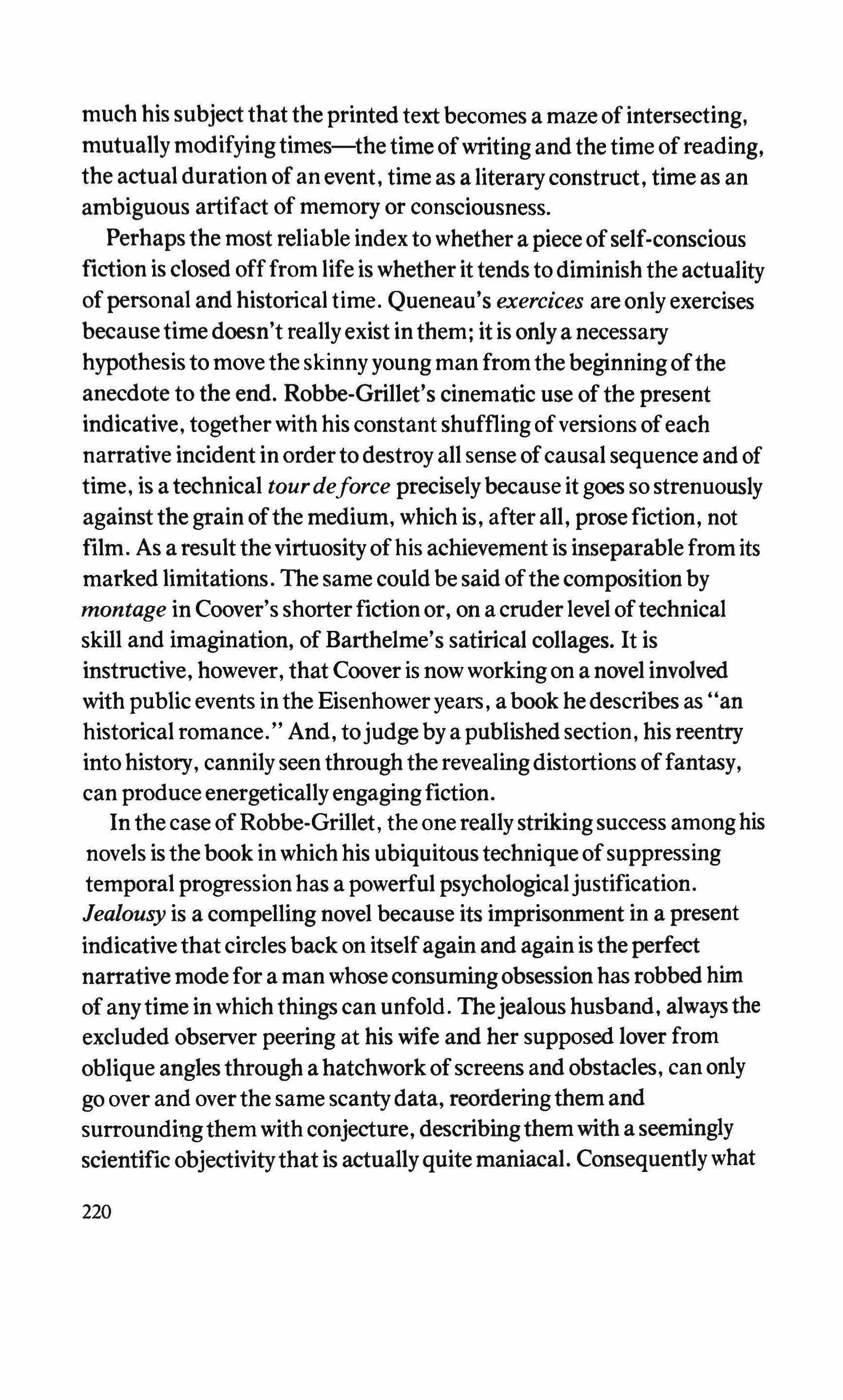
much his subject that the printed text becomes a maze of intersecting, mutuallymodifyingtimes-thetime ofwriting and the time ofreading, the actual duration of an event, time as a literaryconstruct, time as an ambiguous artifact of memory or consciousness.
Perhaps the most reliable index to whether a piece ofself-conscious fiction is closed offfrom life is whether it tends to diminish the actuality ofpersonal and historical time. Queneau's exercices are only exercises becausetime doesn't reallyexist in them; it is only a necessary hypothesis to move the skinny young man from the beginningofthe anecdote to the end. Robbe-Grillet's cinematic use ofthe present indicative, togetherwith his constant shuffling ofversions ofeach narrative incident in order to destroy all sense ofcausal sequence and of time, is a technical tour deforce preciselybecause it goes so strenuously againstthegrain ofthe medium, which is, after all, prosefiction, not film. As a result thevirtuosity of his achievement is inseparable from its marked limitations. The same could be said ofthe compositionby montage in Coover's shorterfiction or, on a cruder level oftechnical skill and imagination, of Barthelme's satirical collages. It is instructive, however, that Coover is now working on a novel involved with public events inthe Eisenhower years, a book he describes as "an historical romance." And, tojudgeby a publishedsection, his reentry intohistory, cannily seen through the revealingdistortions offantasy, can produceenergeticallyengagingfiction.
In the case ofRobbe-Grillet, the one reallystriking success among his novels isthe book in which his ubiquitoustechniqueofsuppressing temporal progressionhas a powerful psychologicaljustification. Jealousy is a compelling novel because its imprisonment in a present indicativethat circles back on itselfagain and again is the perfect narrative mode for a man whose consumingobsession has robbed him of anytime inwhich things can unfold. Thejealous husband, alwaysthe excluded observer peering at his wife and her supposed lover from oblique anglesthrough a hatchwork of screens and obstacles, can only go over and over the same scantydata, reorderingthem and surroundingthem with conjecture, describingthemwith a seemingly scientific objectivitythat is actuallyquite maniacal. Consequentlywhat
220
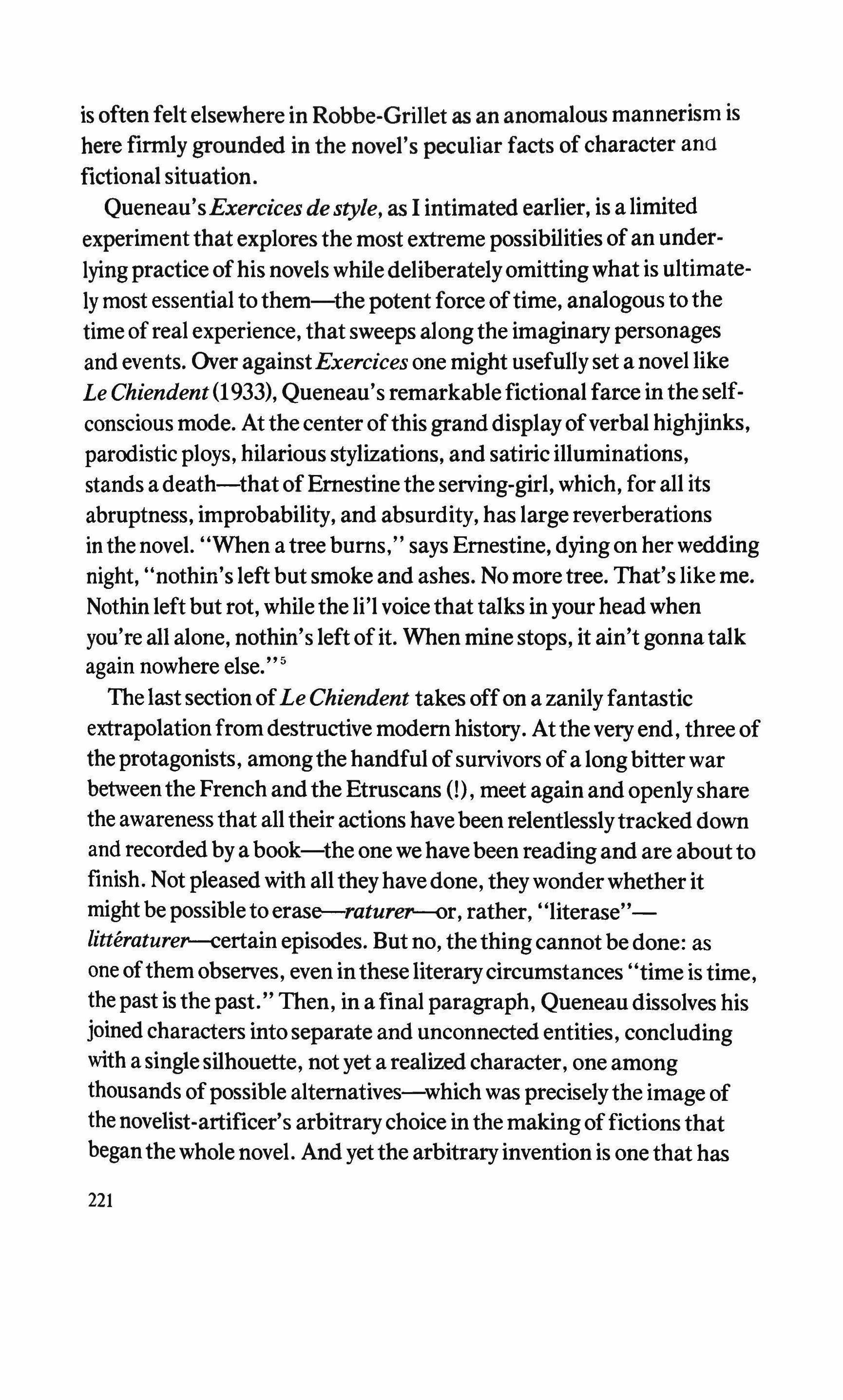
is often felt elsewhere in Robbe-Grillet as an anomalous mannerism is here firmly grounded in the novel's peculiar facts of character and fictional situation.
Queneau'sExercices destyle, as I intimated earlier, is a limited experimentthat explores the most extreme possibilities of an underlyingpractice ofhis novels whiledeliberatelyomitting what is ultimately most essential to them-the potent force oftime, analogous to the time ofreal experience, that sweeps alongthe imaginary personages and events. Over againstExercices one might usefully set a novel like Le Chiendent(1933), Queneau's remarkablefictional farce in the selfconscious mode. At the center ofthis granddisplayofverbal highjinks, parodisticploys, hilarious stylizations, and satiric illuminations, stands a death-that of Ernestine the serving-girl, which, for all its abruptness, improbability, and absurdity, has large reverberations in the novel. "When a tree burns," says Ernestine, dying on her wedding night, "nothin's left but smoke and ashes. No more tree. That's like me. Nothin left but rot, whilethe li'l voice that talks in your head when you're all alone, nothin's left ofit. When mine stops, it ain't gonnatalk again nowhere else." 5
Thelast section ofLe Chiendent takes off on a zanily fantastic extrapolationfromdestructive modem history. Attheveryend, three of the protagonists, amongthe handful ofsurvivors of a longbitter war betweenthe French and the Etruscans (I), meet again and openly share the awareness that all their actions havebeen relentlesslytracked down and recorded by a book-the one we havebeen reading and are about to finish. Not pleased with alltheyhavedone, they wonderwhether it might be possible to erase--raturer--or, rather, "literase"Iitteraturer=-eensui episodes. But no, thething cannot be done: as one ofthem observes, even inthese literarycircumstances "time is time, the past is the past." Then, in a final paragraph, Queneau dissolves his joined characters intoseparate and unconnected entities, concluding with a singlesilhouette, not yet a realized character, one among thousands ofpossible alternatives-which was preciselythe image of the novelist-artificer's arbitrarychoice in the makingoffictions that beganthewhole novel. And yetthe arbitraryinvention is one that has
221
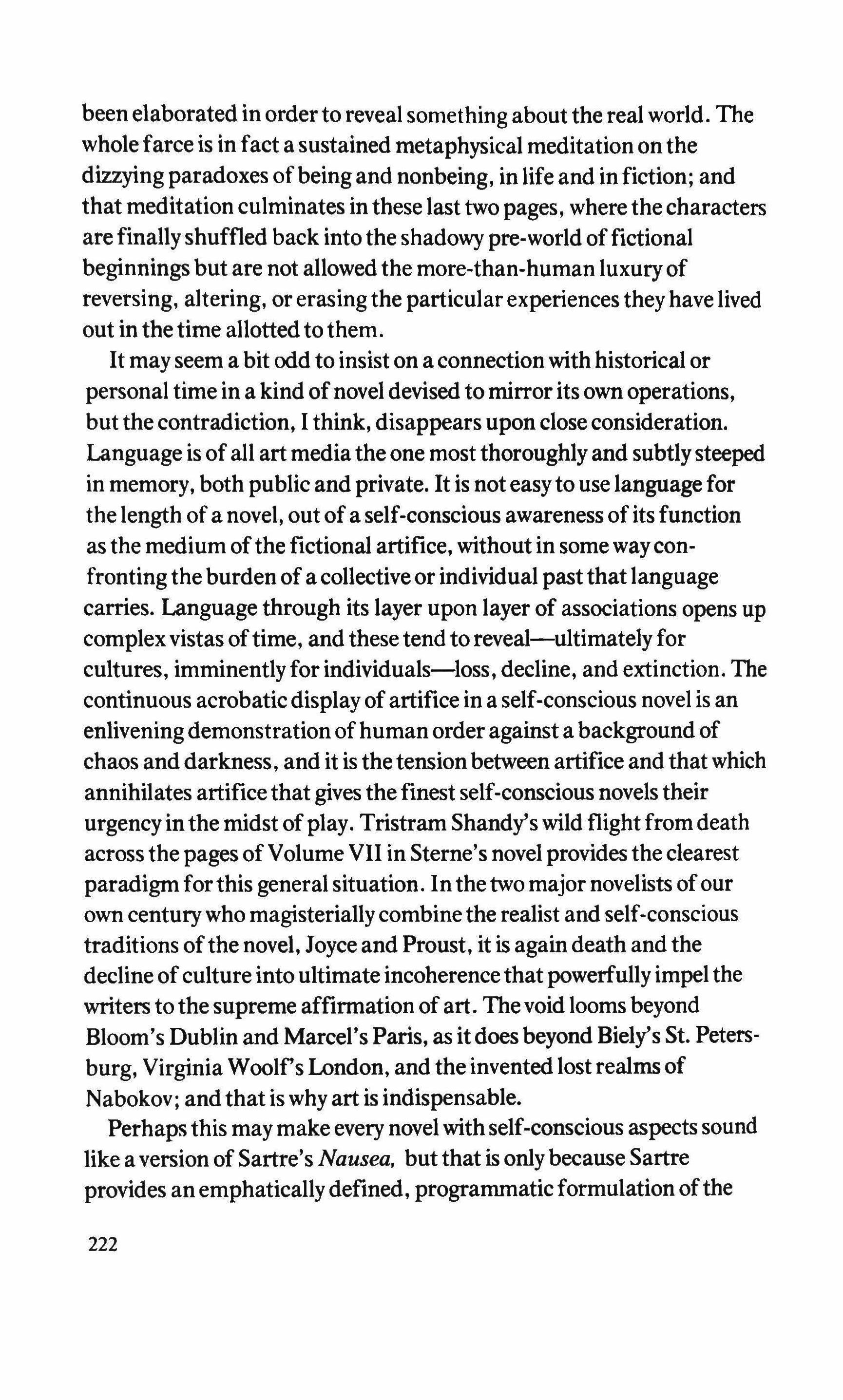
been elaborated in order to reveal something about the real world. The whole farce is in fact a sustained metaphysical meditation on the dizzyingparadoxes ofbeing and nonbeing, in life and in fiction; and that meditation culminates in these last two pages, where the characters are finally shuffled back into the shadowypre-world offictional beginnings but are not allowed the more-than-human luxuryof reversing, altering, or erasing the particularexperiencesthey have lived out in thetime allotted to them.
It may seem a bit odd to insist on a connectionwith historical or personal time in a kind ofnovel devised to mirror its own operations, but the contradiction, I think, disappears upon close consideration. Language is ofall art mediathe one most thoroughly and subtlysteeped in memory, both public and private. It is not easy to use language for the length of a novel, out of a self-conscious awareness ofits function as the medium ofthe fictional artifice, without in some way confronting the burden of a collective or individual pastthat language carries. Language through its layer upon layer of associations opens up complexvistas oftime, and thesetend to reveal-ultimately for cultures, imminently for individuals-loss, decline, and extinction. The continuous acrobatic display ofartifice in a self-conscious novel is an enliveningdemonstration ofhuman order against a background of chaos and darkness, and it is thetensionbetween artifice and that which annihilates artificethat gives the finest self-conscious novels their urgency inthe midst ofplay. Tristram Shandy's wild flight from death across the pages ofVolume VII in Sterne's novel provides the clearest paradigm forthis general situation. In the two major novelists of our own century who magisteriallycombinethe realist and self-conscious traditions ofthe novel, Joyce and Proust, it is again death and the decline ofculture into ultimate incoherencethat powerfullyimpel the writers to the supreme affirmation of art. The void looms beyond Bloom's Dublin and Marcel's Paris, as itdoes beyond Biely's St. Petersburg, Virginia Woolf's London, and the invented lost realms of Nabokov; and that is why art is indispensable.
Perhaps this may make every novel with self-conscious aspects sound like a version of Sartre's Nausea, but that is onlybecause Sartre provides an emphaticallydefined, programmaticformulation ofthe
222
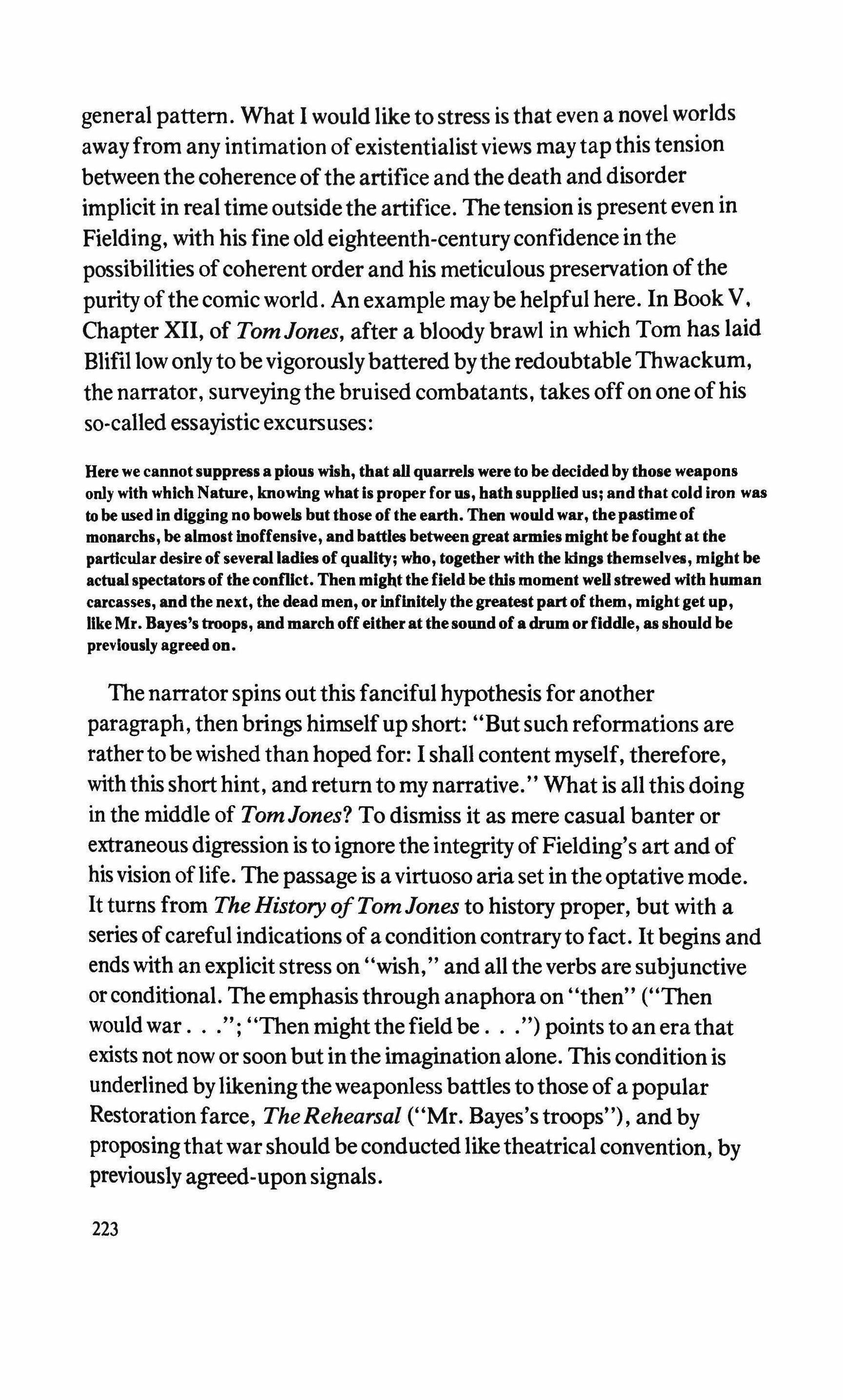
general pattern. What I would like to stress is that even a novel worlds awayfrom any intimation ofexistentialist views may tap this tension betweenthe coherence ofthe artifice and thedeath and disorder implicit in real time outside the artifice. The tension is present even in Fielding, with his fine old eighteenth-centuryconfidence inthe possibilities ofcoherent order and his meticulous preservation ofthe purity ofthe comic world. An example maybe helpful here. In Book V, Chapter XII, of TomJones, after a bloody brawl in which Tom has laid Blifillowonly to be vigorouslybattered bythe redoubtable Thwackum, the narrator, surveyingthe bruised combatants, takes off on one ofhis so-called essayistic excursuses:
Here we cannot suppress a pious wish, that aU quarrels were to be decided by those weapons only with which Nature, knowing what Is proper for us, hath suppUed us; and that cold Iron was to be used in digging no bowels but those of the earth. Then would war, the pastimeof monarchs, be almost Inoffensi"ve, and battles betweengreat armies might befought at the particular desire ofseveral ladies of quality; who, together with the Idngsthemselves, might be actualspectators of the conflict. Then might the field be this moment well strewed with human carcasses, and tbe next, the dead men, or infinitely the greatest partof them, mightget up, like Mr. Bayes'stroops, and march offeither atthe sound of a drum or fiddle, as should be previously agreed on.
The narrator spins out this fanciful hypothesis for another paragraph, then brings himselfup short: "Butsuch reformations are rather tobe wished than hoped for: I shall content myself, therefore, with this short hint, and return to my narrative." What is all this doing in the middle of TomJones? To dismiss it as mere casual banter or extraneous digression is to ignore the integrity of Fielding's art and of hisvision oflife. The passage is a virtuoso aria set in theoptative mode. It turns from The History of TomJones to history proper, but with a series ofcareful indications of a condition contraryto fact. It begins and ends with an explicit stress on "wish," and all the verbs are SUbjunctive or conditional. The emphasisthrough anaphora on "then" ("Then would war. ."; "Then might the field be. .") points to an era that exists not now or soon but inthe imagination alone. This condition is underlined bylikeningtheweaponless battles to those of a popular Restorationfarce, TheRehearsal ("Mr. Bayes'stroops"), and by proposingthat war should be conducted like theatrical convention, by previouslyagreed-uponsignals.
223
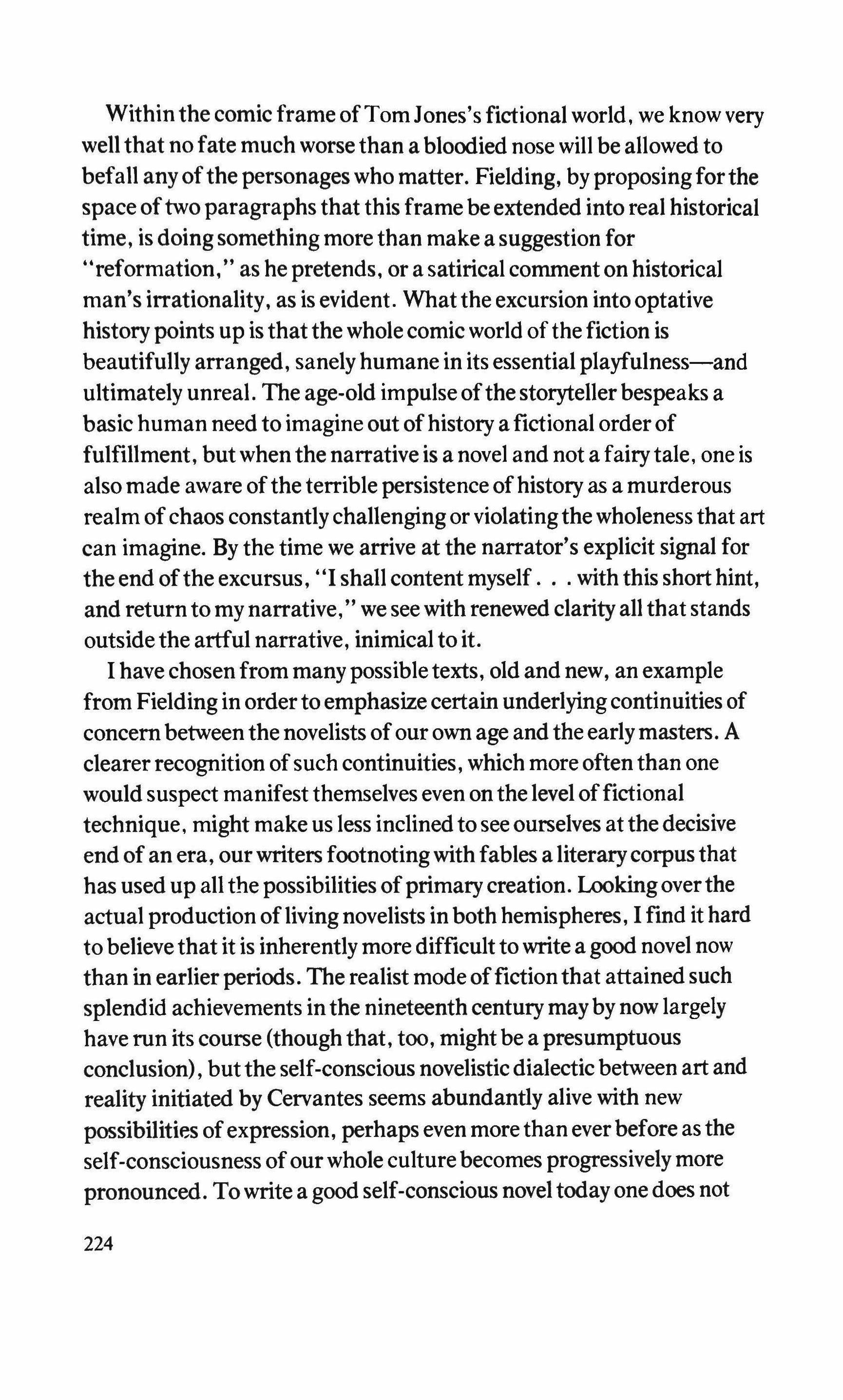
Within the comic frame ofTom Jones's fictional world, we know very well that no fate much worse than a bloodied nose will be allowed to befall anyofthe personages who matter. Fielding, byproposingforthe space oftwo paragraphs that this frame be extended into real historical time, is doingsomething more than make a suggestion for "reformation," as he pretends, or a satirical comment on historical man's irrationality, as is evident. What the excursion into optative historypoints up is that the whole comic world ofthe fiction is beautifully arranged, sanely humane in its essential playfulness-and ultimately unreal. The age-old impulse ofthe storytellerbespeaks a basic human need to imagine out ofhistory a fictional order of fulfillment, butwhen the narrative is a novel and not a fairytale, one is also made aware ofthe terrible persistence ofhistory as a murderous realm ofchaos constantlychallenging or violatingthe wholeness that art can imagine. By the time we arrive at the narrator's explicit signal for the end ofthe excursus, "I shall content myself. with this short hint, and return to my narrative," we see with renewed clarity all that stands outsidethe artful narrative, inimical to it.
I have chosen from many possibletexts, old and new, an example from Fielding in order to emphasize certain underlyingcontinuities of concern between the novelists of our own age and the early masters. A clearer recognition ofsuch continuities, which more often than one would suspect manifest themselves even on the level offictional technique, might make us less inclined to see ourselves at the decisive end of an era, our writers footnoting with fables a literarycorpus that has used up all the possibilities ofprimary creation. Looking over the actual productionofliving novelists in both hemispheres, I find it hard to believethat it is inherently more difficult to write a good novel now than in earlier periods. The realist mode offiction that attained such splendid achievements inthe nineteenth century may by now largely have run its course <thoughthat, too, might be a presumptuous conclusion), butthe self-conscious novelistic dialectic between art and reality initiated by Cervantes seems abundantly alive with new possibilities ofexpression, perhaps even more than ever before as the self-consciousness of our whole culturebecomes progressively more pronounced. To write a good self-conscious novel today one does not
224
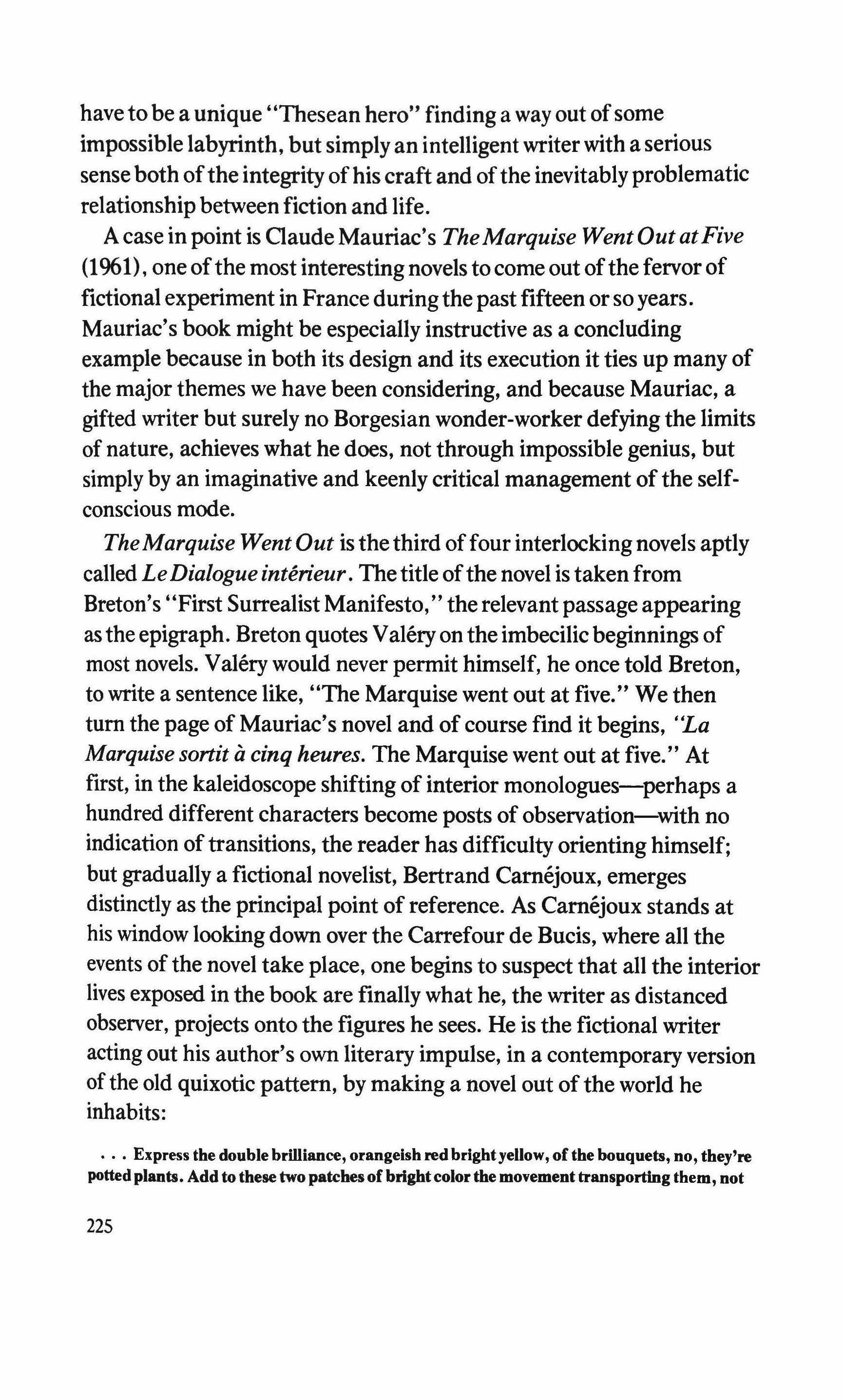
have to be a unique "Thesean hero" finding a way out of some impossiblelabyrinth, but simply an intelligent writer with a serious sense both ofthe integrity ofhis craft and ofthe inevitablyproblematic relationship between fiction and life.
A case in point is Claude Mauriac's TheMarquise Went Out atFive (1961), one ofthe most interesting novels to come out ofthe fervor of fictional experiment in France duringthe past fifteen or so years. Mauriac's book might be especially instructive as a concluding example because in both its design and its execution it ties up many of the major themes we have been considering, and because Mauriac, a gifted writer but surely no Borgesian wonder-worker defying the limits of nature, achieves what he does, not through impossible genius, but simplyby an imaginative and keenly critical management ofthe selfconscious mode.
TheMarquise WentOut is thethird offour interlockingnovels aptly called LeDialogue interieur, The title ofthe novel is taken from Breton's "First Surrealist Manifesto," the relevant passage appearing as the epigraph. Breton quotes Valery on the imbecilic beginnings of most novels. Valery would never permit himself, he once told Breton, to write a sentence like, "The Marquise went out at five." We then turn the page of Mauriac's novel and of course find it begins, "La Marquise sortit a cinq heures. The Marquise went out at five." At first, in the kaleidoscope shifting of interior monologues-perhaps a hundred different characters become posts of observation-with no indication oftransitions, the reader has difficultyorienting himself; but gradually a fictional novelist, Bertrand Carnejoux, emerges distinctly as the principal point of reference. As Carnejoux stands at his window looking down over the Carrefour de Bucis, where all the events ofthe novel take place, one begins to suspect that all the interior lives exposed in the book are finally what he, the writer as distanced observer, projects onto the figures he sees. He is the fictional writer acting out his author's own literary impulse, in a contemporary version ofthe old quixotic pattern, by making a novel out ofthe world he inhabits:
Express the double brilliance, orangeish red brightyeUow, of the bouquets, no, they're pottedplants. Add to these two patches of brightcolor the movement transporting them, not
225
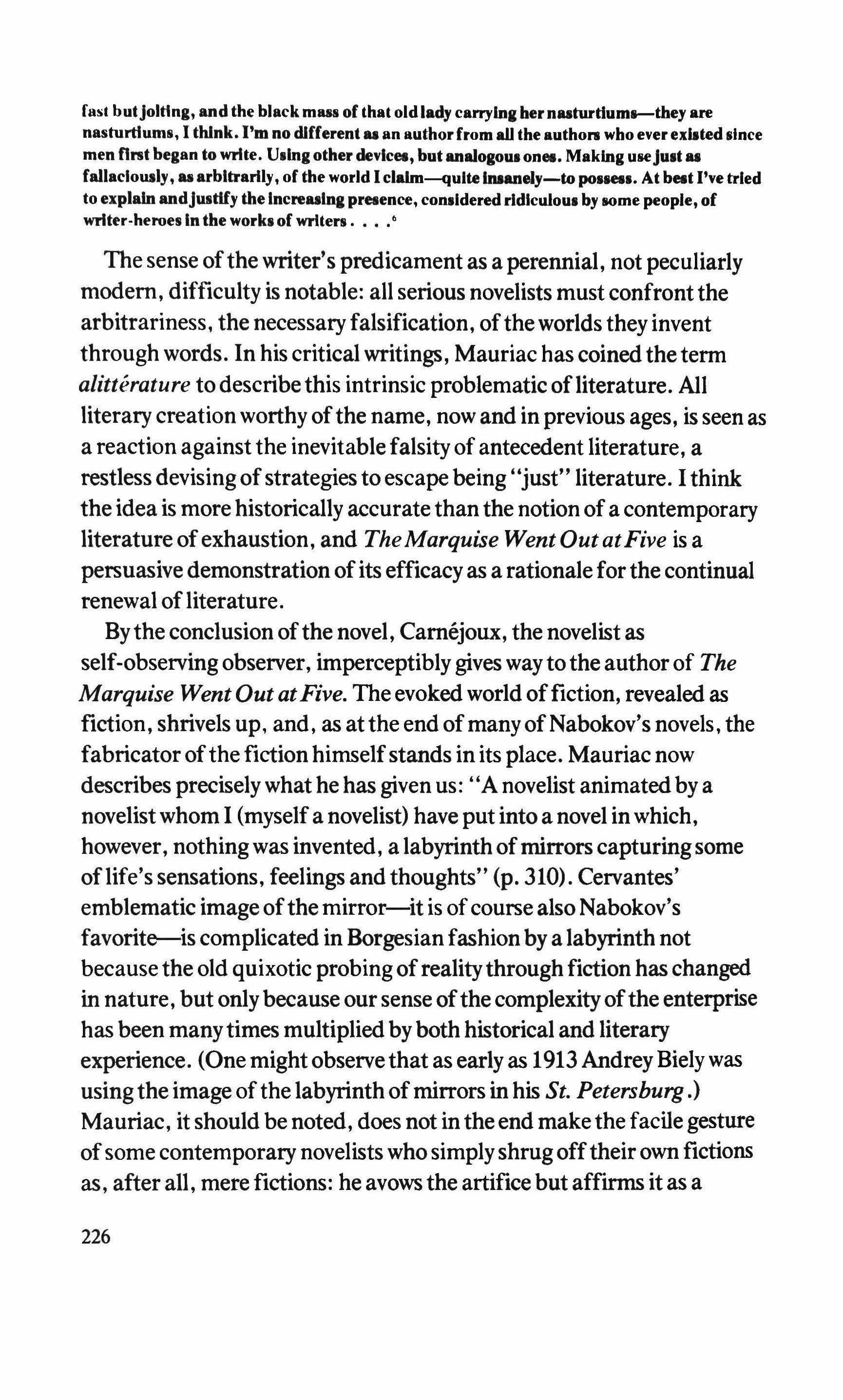
fast butjolttng, and the black mll8ll of that oldlady carrylDahernasturtluml-they are nasturtiums, I think. I'm no different as an author from aU the authon wbo ever exlated since men fint began to write. VIlDg otber clevlcllI, butanalogoUl on•• MaklDg usejUlt as fallacloUlly, as arbitrarily, of tbe world Iclalm-qulte lnIanely-to poI I. At best I've tried to explaln andjUltify the Increaslna presence, consldered rldiculoul by some people, of writer-heroes In tbe work. of wrlten .••. '
The sense ofthe writer's predicament as a perennial, not peculiarly modern, difficulty is notable: all serious novelists must confrontthe arbitrariness, the necessary falsification, oftheworlds they invent through words. In his critical writings, Mauriac has coined the term alitterature to describethis intrinsic problematic ofliterature. All literary creation worthy ofthe name, now and in previous ages, is seen as a reaction against the inevitablefalsity of antecedent literature, a restless devisingofstrategies to escape being"just" literature. I think the idea is more historically accurate than the notion of a contemporary literature ofexhaustion, and TheMarquise Went Out atFive is a persuasive demonstration ofits efficacy as a rationale forthe continual renewal ofliterature.
Bythe conclusion ofthe novel, Carnejoux, the novelist as self-observingobserver, imperceptiblygives way to the authorof The Marquise WentOut atFive. The evoked world offiction, revealed as fiction, shrivels up, and, as atthe end of many ofNabokov's novels, the fabricator ofthe fiction himselfstands in its place. Mauriac now describes precisely what he has given us: "A novelist animated by a novelistwhom I (myself a novelist) have put into a novel inwhich, however, nothing was invented, a labyrinth ofmirrors capturing some oflife's sensations, feelings and thoughts" (p. 310). Cervantes' emblematic image ofthe mirror-it is of course also Nabokov's favorite--is complicated in Borgesian fashionby a labyrinth not because the old quixotic probingofrealitythrough fiction has changed in nature, but onlybecause our sense ofthe complexityofthe enterprise has been manytimes multipliedbyboth historical and literary experience. (Onemightobserve that as early as 1913 AndreyBiely was usingthe image ofthe labyrinth ofmirrors in his St. Petersburg.) Mauriac, it should be noted, does not intheend makethe facile gesture of some contemporary novelists whosimplyshrugofftheir own fictions as, after all, mere fictions: he avows the artifice but affirms it as a
226
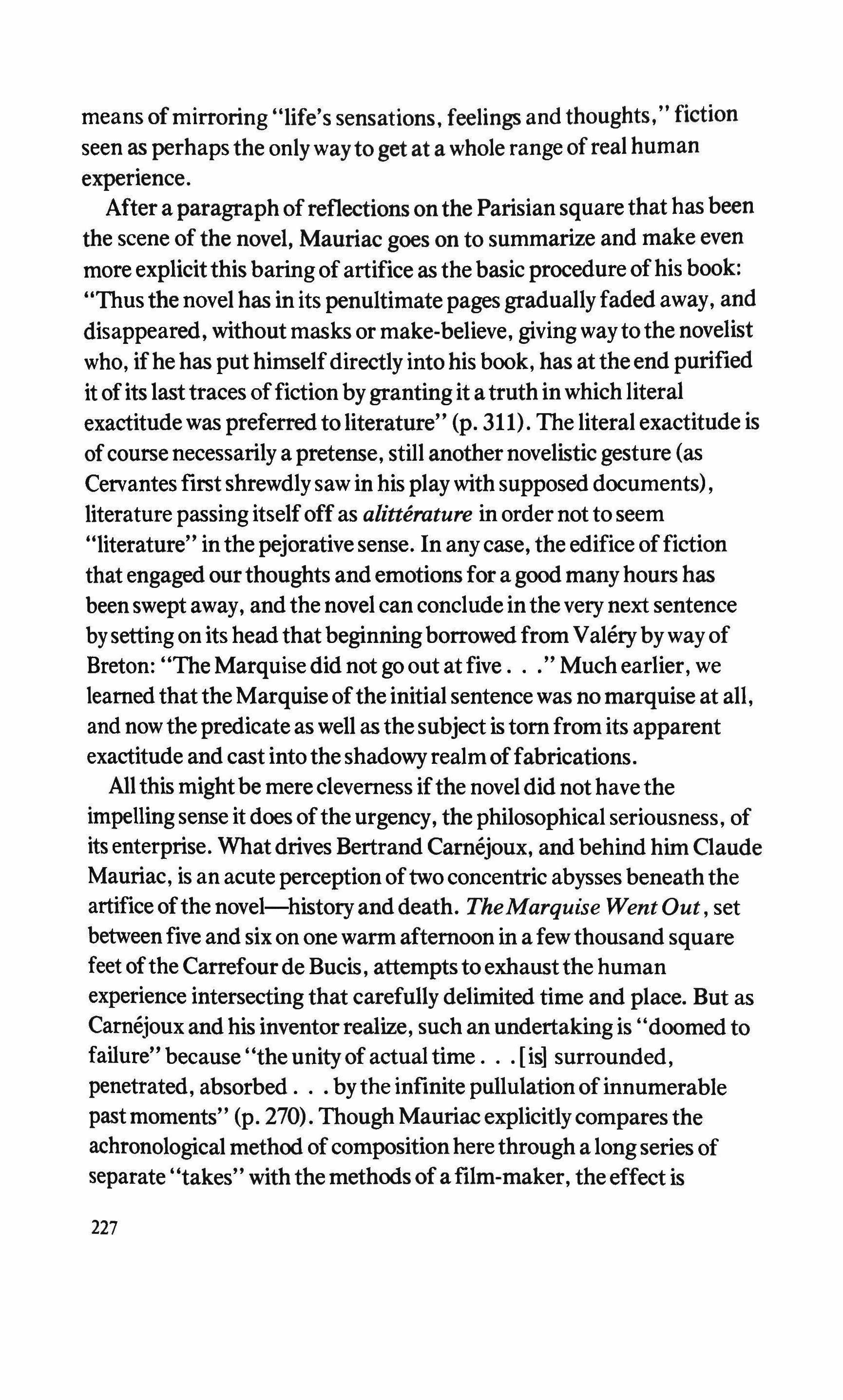
means ofmirroring "life's sensations, feelings and thoughts," fiction seen as perhaps the only wayto get at a whole range ofreal human experience.
After a paragraph ofreflections on the Parisian square that has been the scene of the novel, Mauriac goes on to summarize and make even more explicitthis baring of artifice as the basic procedure ofhis book: "Thusthe novel has in its penultimate pages graduallyfaded away, and disappeared, without masks or make-believe, giving wayto the novelist who, ifhe has put himselfdirectly into his book, has at theend purified it ofits last traces offiction bygrantingit a truth inwhich literal exactitude was preferred to literature" (p. 311). The literal exactitude is of course necessarily a pretense, still anothernovelistic gesture (as Cervantes first shrewdly saw in his play with supposed documents), literature passing itselfoff as alitterature in order not to seem "literature" inthe pejorative sense. In any case, the edifice offiction that engaged our thoughts and emotions for a good many hours has been swept away, and the novel can concludeinthevery next sentence bysetting on its head thatbeginningborrowed from Valerybyway of Breton: "The Marquise did not go out at five. ." Much earlier, we learned thatthe Marquise oftheinitial sentence was no marquise at all, and now the predicate as well as thesubject is tom from its apparent exactitude and cast intotheshadowy realm offabrications.
Allthis mightbe mere cleverness ifthe noveldid not havethe impelling sense it does ofthe urgency, the philosophical seriousness, of its enterprise. Whatdrives Bertrand Carnejoux, and behind him Claude Mauriac, is an acute perceptionoftwo concentric abysses beneath the artifice ofthe novel-history and death. TheMarquise Went Out, set between five and six on one warm afternoon in a fewthousand square feet ofthe Carrefourde Bucis, attempts to exhaustthe human experience intersecting that carefully delimited time and place. But as Carnejoux and his inventor realize, such an undertaking is "doomed to failure" because "the unityof actualtime. [is] surrounded, penetrated, absorbed bythe infinite pullulationofinnumerable pastmoments" (p. 270). Though Mauriac explicitly compares the achronological method ofcompositionherethrough a longseries of separate "takes" with the methods of a film-maker, theeffect is
227
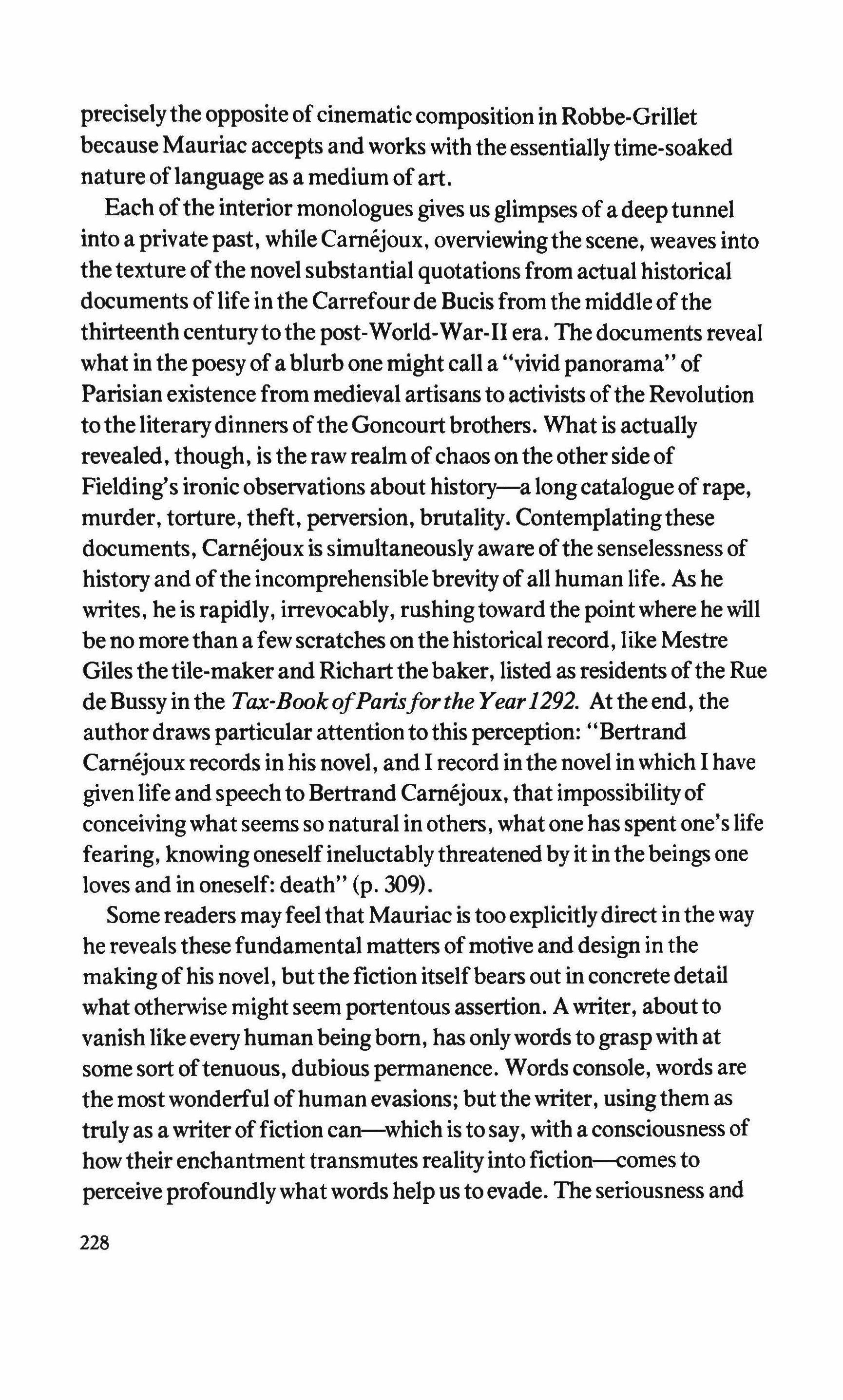
preciselythe opposite ofcinematic composition in Robbe-Grillet because Mauriac accepts and works with theessentiallytime-soaked nature oflanguage as a medium ofart.
Each ofthe interior monologues gives us glimpses of a deeptunnel into a privatepast, while Carnejoux, overviewingthe scene, weaves into the texture ofthe novel substantial quotations from actual historical documents oflife inthe Carrefour de Bucis from the middle ofthe thirteenth centuryto the post-World-War-II era. The documents reveal what in the poesy of a blurb one might call a "vivid panorama" of Parisian existence from medieval artisans to activists ofthe Revolution to the literarydinners oftheGoncourt brothers. What is actually revealed, though, is the raw realm ofchaos on the other side of Fielding's ironic observations about history-alongcatalogue ofrape, murder, torture, theft, perversion, brutality. Contemplatingthese documents, Carnejoux is simultaneously aware ofthe senselessness of historyand ofthe incomprehensiblebrevityofall human life. As he writes, he is rapidly, irrevocably, rushingtoward the pointwhere he will be no more than a few scratches on the historical record, like Mestre Giles thetile-maker and Richart the baker, listed as residents ofthe Rue de Bussy in the Tax-BookofParisforthe Year1292. Attheend, the author draws particular attention to this perception: "Bertrand Carnejoux records in his novel, and I record inthe novel in which I have given life and speech to Bertrand Camejoux, that impossibilityof conceivingwhat seems so natural in others, what one has spent one's life fearing, knowing oneself ineluctably threatened by it inthebeings one loves and in oneself: death" (p. 309).
Some readers may feel that Mauriac is too explicitly direct in the way he reveals these fundamental matters ofmotive and design in the makingofhis novel, butthe fiction itselfbears out in concrete detail what otherwise might seem portentous assertion. A writer, about to vanish like every humanbeingborn, has onlywords to graspwith at some sort oftenuous, dubious permanence. Words console, words are the most wonderful ofhuman evasions; butthewriter, usingthem as truly as a writer offiction can-which is to say, with a consciousness of how their enchantment transmutes realityinto fiction-comes to perceiveprofoundlywhat words help us to evade. The seriousness and
228
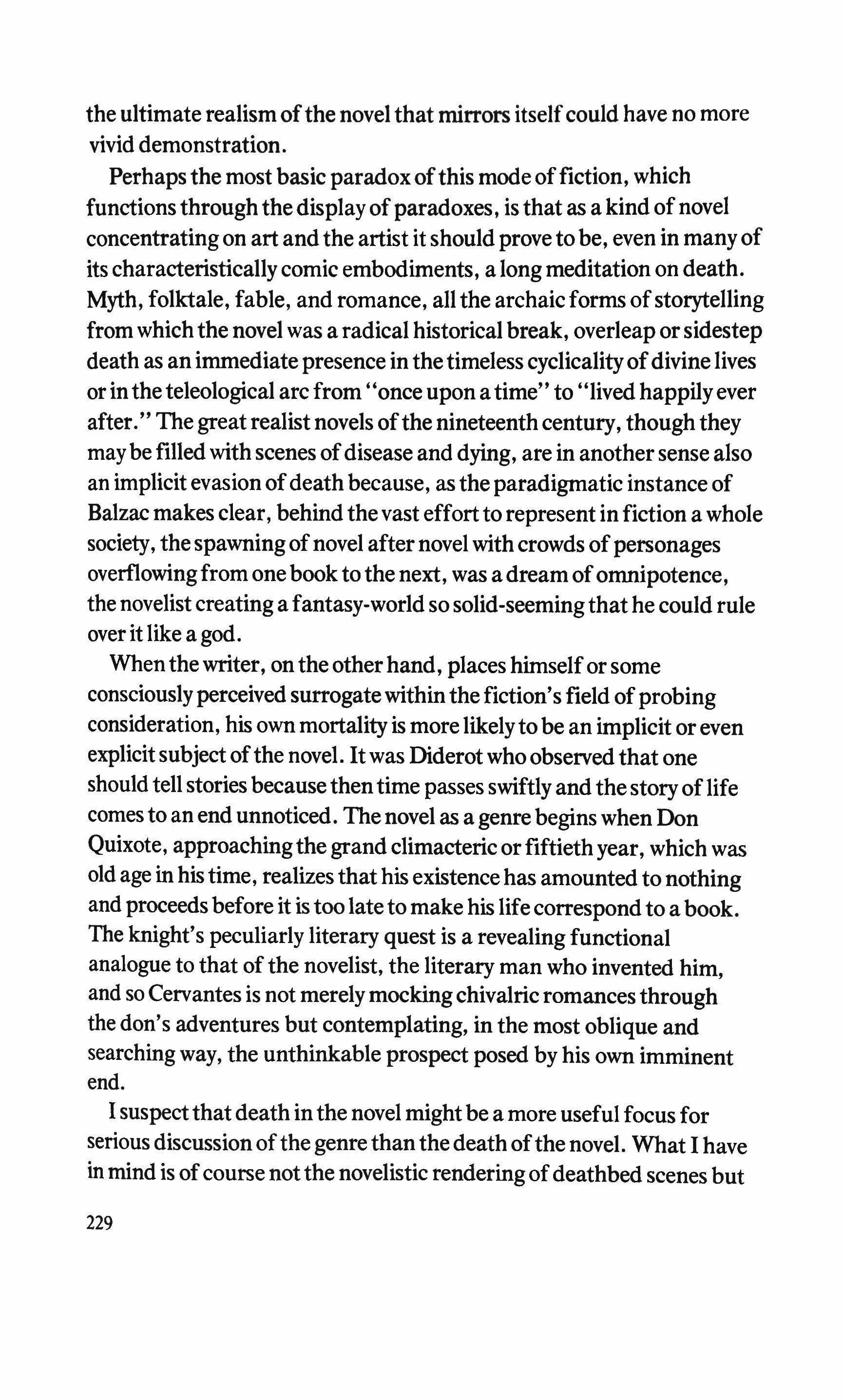
the ultimate realismofthe novel that mirrors itselfcould have no more vivid demonstration.
Perhaps the most basic paradoxofthis mode offiction, which functions through the display ofparadoxes, is that as a kind of novel concentrating on art andthe artist it should prove to be, even in many of its characteristically comic embodiments, a long meditation on death. Myth, folktale, fable, and romance, all the archaicforms ofstorytelling from which the novel was a radical historical break, overleap or sidestep death as an immediate presence in thetimeless cyclicalityofdivine lives or intheteleological arc from "once upon a time" to "lived happily ever after." The great realist novels ofthe nineteenth century, thoughthey may be filled with scenes ofdisease and dying, are in another sense also an implicit evasion ofdeath because, as the paradigmatic instance of Balzac makes clear, behind the vast effort to represent in fiction a whole society, thespawningofnovel after novel with crowds ofpersonages overflowingfrom one book to the next, was a dream ofomnipotence, the novelist creating a fantasy-world so solid-seemingthathe could rule over itlike a god.
When thewriter, on the otherhand, places himself or some consciouslyperceived surrogate within the fiction's field of probing consideration, his own mortalityis more likely to be an implicit or even explicitsubject ofthe novel. It was Diderot who observed that one should tell stories becausethentime passes swiftly and thestoryoflife comes to an end unnoticed. Thenovel as a genre begins when Don Quixote, approaching the grand climacteric or fiftieth year, which was old age in his time, realizes that his existencehas amounted to nothing and proceedsbefore it is too late to make his life correspond to a book. The knight's peculiarly literary quest is a revealing functional analogue to that ofthe novelist, the literary man who invented him, and so Cervantes is not merelymockingchivalric romances through the don's adventures but contemplating, in the most oblique and searching way, the unthinkable prospect posed by his own imminent end.
I suspectthat death inthe novel might be a more useful focus for serious discussion ofthe genre than the death ofthe novel. What I have in mind is of course notthe novelistic renderingofdeathbed scenes but
229
how the novel manages to put us in touch with the imponderableimplications ofhuman mortalitythrough theverycelebration oflife implicit in the building ofvivid and various fictions. This is the ultimate turn of the Copernican revolution in the making of fictions that Cervantes effected. The impulse offabulation, which men had typically used to create an imaginarytime beautifully insulated from the impinging presence oftheir own individual deaths, was turned back on itself, held up to a mirror ofcriticism as it reflected reality in its inevitablydistortive glass. As a result it became possible, ifnot forthe first time then surely forthe first time on this scale ofnarrative amplitude and richness, to delight in the lifelike excitements ofinvented personages and adventures, and simultaneously to be reminded ofthat other world ofours, ruled by chance and given over to death. The mirror held to the mirrorof art held to nature, in Cervantes and in his countless progeny, proved to be not merely an ingenious trick but a necessary operation for a skeptical culture nevertheless addicted, as all cultures have been, to the pleasures and discoveries offabulation. Ongoingliteraryhistoryis alwaysmodifying our vision ofearlier stages ofliterarydevelopment, and the course ofthe novel from Joyce to Nabokov and beyond mayto some degreerequire a shift in perspective upon whathappened in the novel during the three centuries before our own. Today, as varieties of novelistic self-consciousness proliferate, the mode offiction first defined when a certain aginghidalgo set out to imitate his books appears far from exhausted. On the contrary, in the hands ofgifted writers it comes to seem increasingly our most precisely fashioned instrument forjoiningimagined acts and figures with real things.
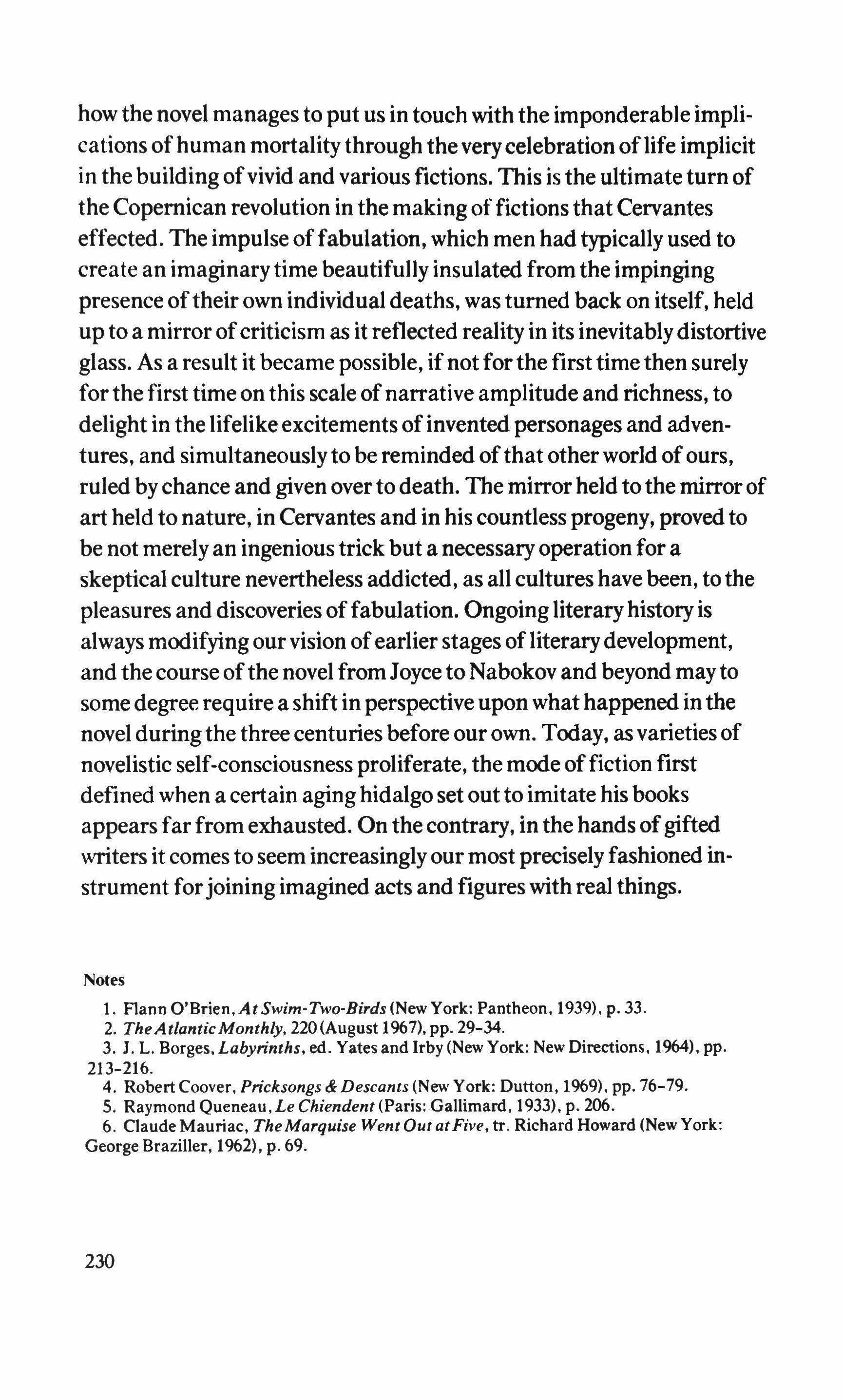
Notes
1. Flann O'Brien. At Swim-Two-Birds (New York: Pantheon. 1939). p. 33.
2. TheAtlanticMonthly. 220 (August 1967). pp. 29-34.
3. J. L. Borges. Labyrinths. ed. Yates and Irby (New York: New Directions. 1964). pp. 213-216.
4. Robert Coover. Pricksongs & Descants (New York: Dutton. 1969). pp. 76-79.
S. Raymond Queneau, Le Chiendent (Paris: Gallimard, 1933). p. 206.
6. Claude Mauriac, TheMarquise WentOutatFive. tr. Richard Howard (New York: George Braziller.I962). p. 69.
230
Contemporary fiction and criticism
Edward W. Said
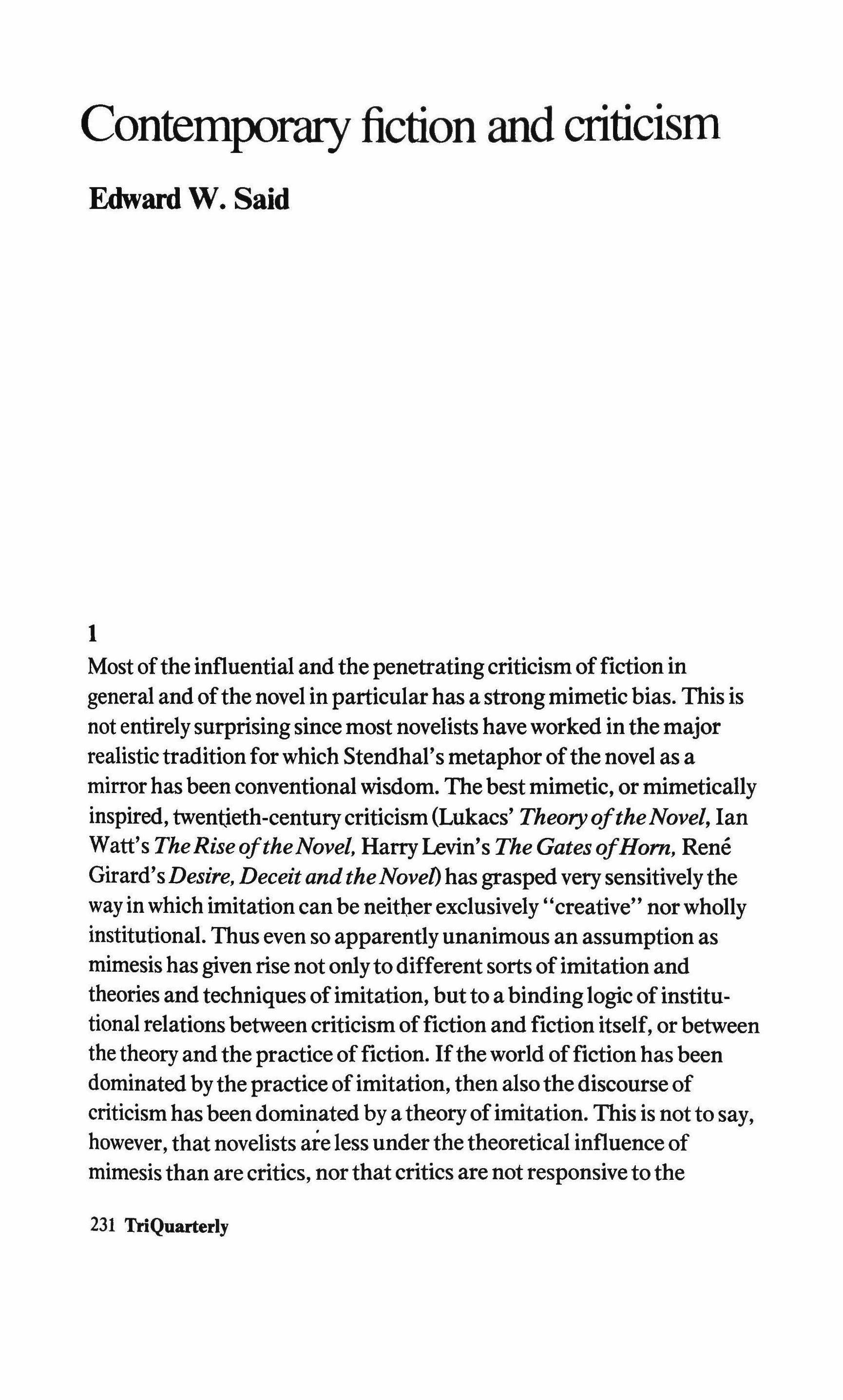
Most ofthe influential andthe penetratingcriticism offiction in general and ofthe novel in particularhas a strongmimetic bias. This is not entirelysurprisingsince most novelists have worked in the major realistic traditionforwhich Stendhal's metaphor ofthe novel as a mirrorhas been conventional wisdom. Thebest mimetic, or mimetically inspired,twentieth-centurycriticism (Lukacs' TheoryoftheNovel, Ian Watt's TheRiseoftheNovel, Harry Levin's The Gates ofHom, Rene Girard'sDesire, DeceitandtheNovel)has grasped very sensitivelythe way in which imitation can be neitherexclusively"creative" nor wholly institutional. Thus even so apparently unanimous an assumption as mimesis has given rise not onlyto different sorts ofimitation and theories and techniques ofimitation, but to a bindinglogic ofinstitutional relationsbetween criticism offiction and fiction itself, or between thetheory andthe practice offiction. Iftheworld offiction has been dominated bythe practice ofimitation, then alsothediscourse of criticism has been dominated by a theoryofimitation. This is not to say, however, that novelists are less underthe theoretical influence of mimesisthan are critics, nor that critics are not responsiveto the
231 TriQuarterly
1
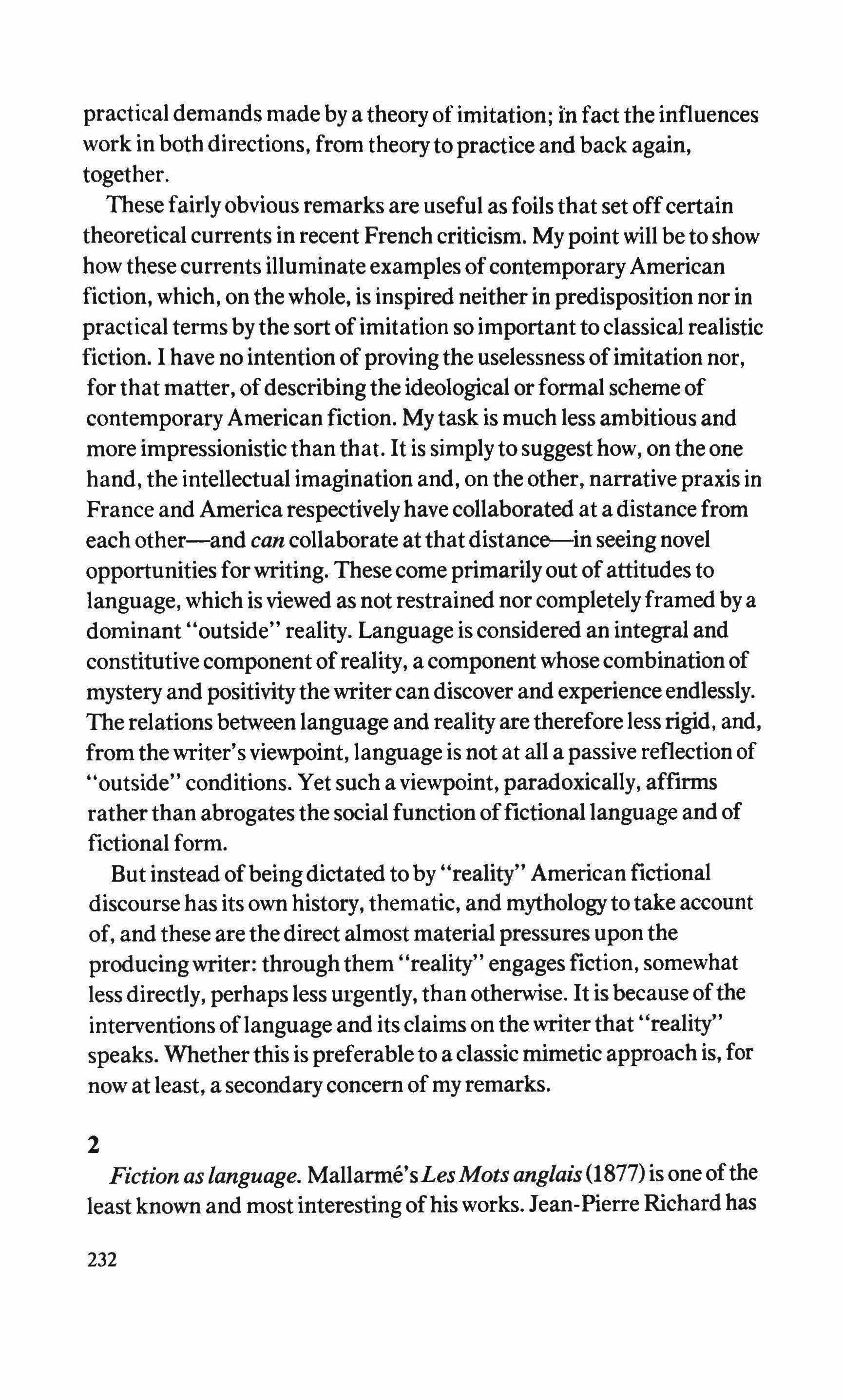
practical demands made by a theory of imitation; in fact the influences work in both directions. from theory to practice and back again, together.
These fairly obvious remarks are useful as foils that set offcertain theoretical currents in recent French criticism. Mypoint will be to show how these currents illuminate examples ofcontemporary American fiction, which. on thewhole. is inspired neither in predisposition nor in practical terms bythe sort ofimitation so important to classical realistic fiction. I have no intention ofproving the uselessness ofimitation nor, for that matter, ofdescribing the ideological or formal scheme of contemporary American fiction. Mytask is much less ambitious and more impressionistic thanthat. It is simply to suggesthow, on the one hand, the intellectual imagination and, on the other, narrative praxis in France and America respectively have collaborated at a distance from each other-and can collaborate at that distance-in seeing novel opportunities forwriting. These come primarily out ofattitudes to language, which is viewed as not restrained nor completelyframed by a dominant "outside" reality. Language is considered an integral and constitutive component ofreality, a component whosecombination of mystery and positivitythe writer can discover and experienceendlessly. The relations between language and reality are therefore less rigid, and, fromthe writer's viewpoint, language is not at all a passive reflection of "outside" conditions. Yet such a viewpoint, paradoxically, affirms ratherthan abrogates the social function offictional language and of fictional form.
But instead ofbeingdictated to by"reality" American fictional discourse has its own history, thematic, and mythology to take account of, and these are the direct almost material pressures upon the producingwriter: through them "reality" engages fiction, somewhat less directly, perhaps less urgently, than otherwise. It is because ofthe interventions oflanguage and its claims on the writerthat "reality" speaks. Whether this is preferable to a classic mimetic approachis, for now at least, a secondary concern of my remarks.
2 Fiction as language. Mallarme'sLesMots anglais(1877) is one ofthe least known and most interesting ofhis works. Jean-Pierre Richard has
232
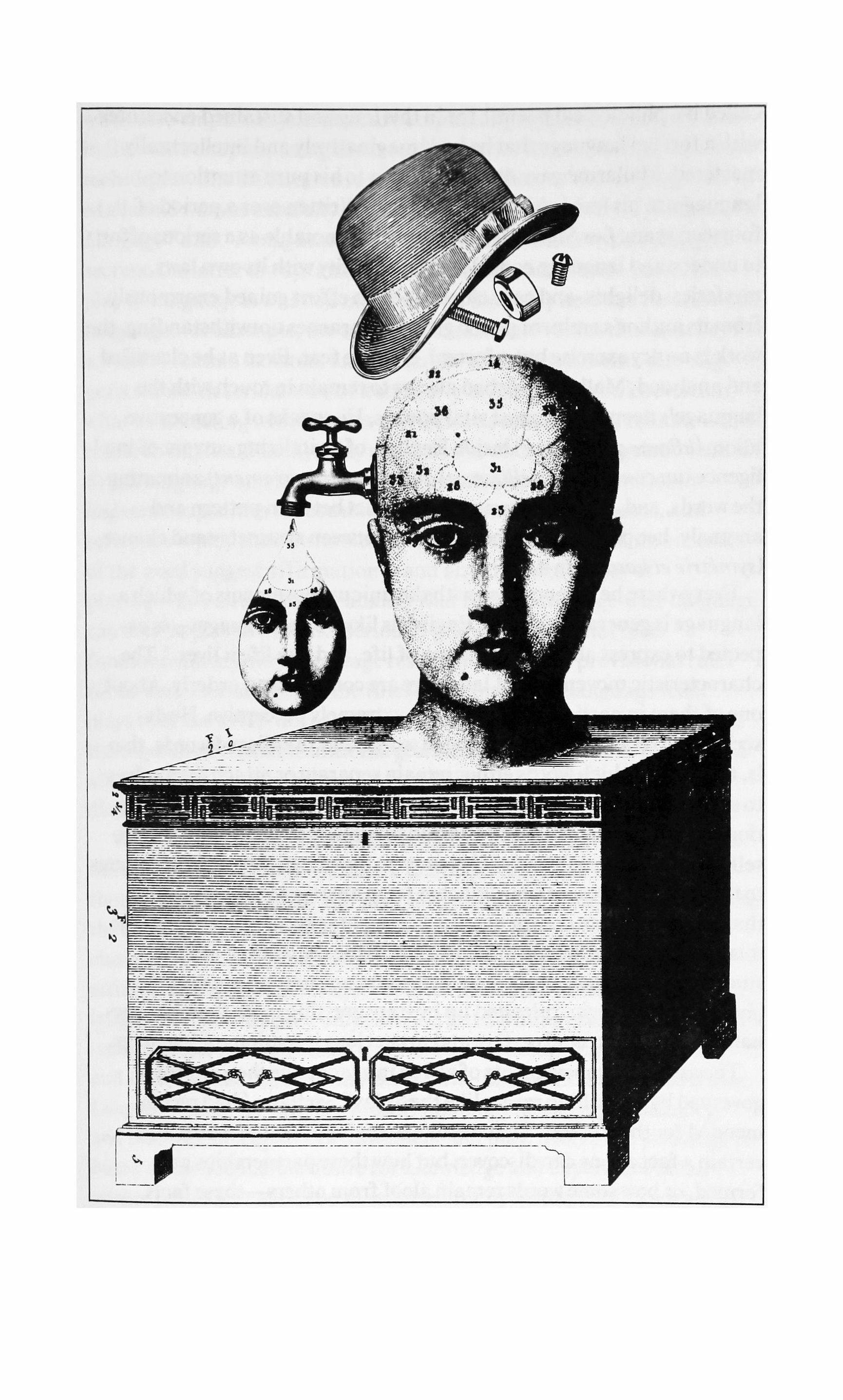
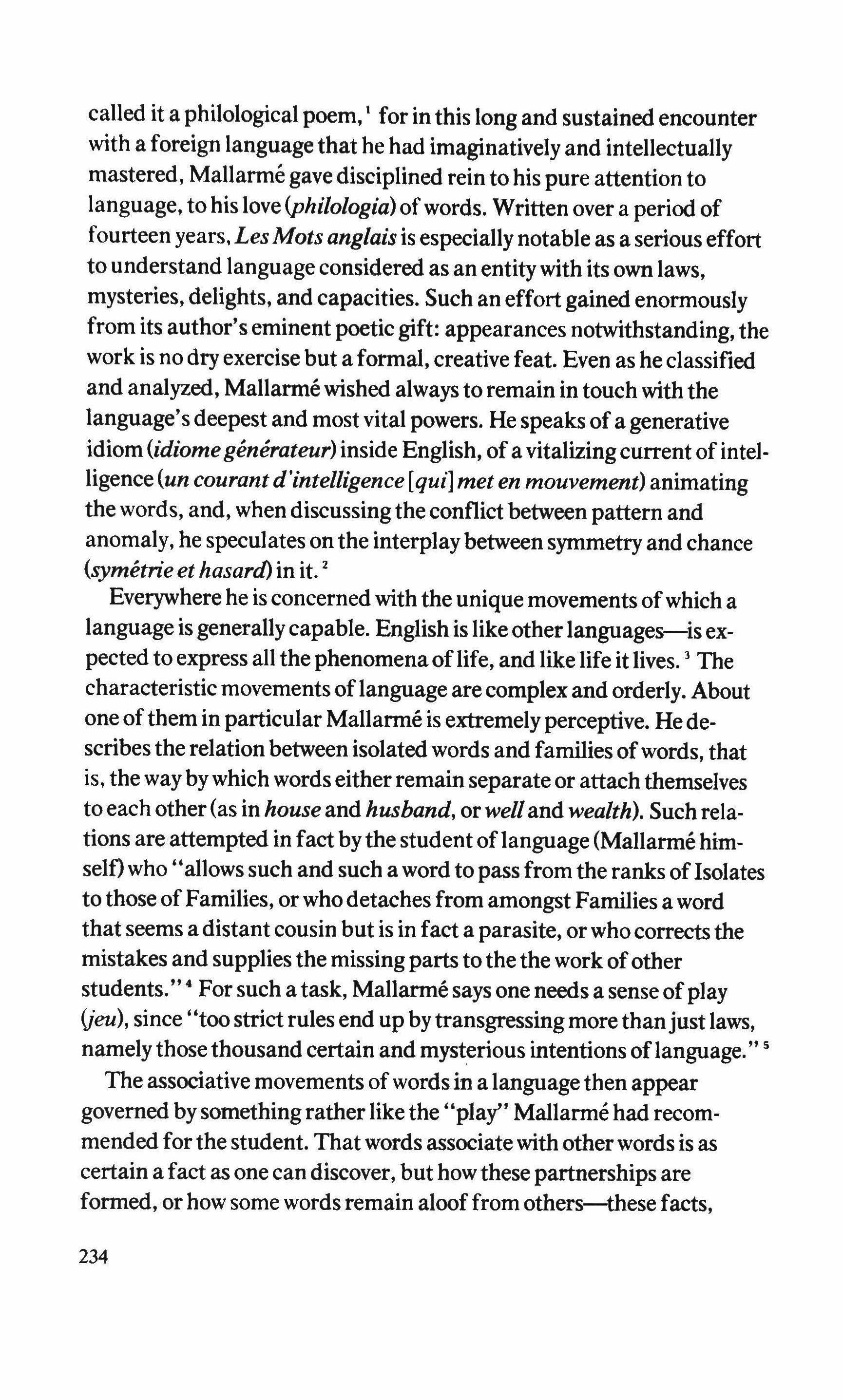
called it a philological poem, I for in this long and sustained encounter with a foreign languagethat he had imaginatively and intellectually mastered, Mallarme gave disciplined rein to his pure attention to language. to his love (Phi/ologia) of words. Written over a period of fourteen years. LesMots anglais is especially notable as a serious effort to understand language considered as an entitywith its own laws, mysteries, delights. and capacities. Such an effort gained enormously from its author's eminent poeticgift: appearances notwithstanding, the work is no dry exercise but a formal. creative feat. Even as he classified and analyzed, Mallarmewished always to remain in touch with the language'sdeepest and most vital powers. He speaks of a generative idiom (idiomegenerateur) inside English, of a vitalizing current of intelligence(un courant d'intelligence[qui] met en mouvement) animating the words, and, when discussingthe conflict between pattern and anomaly, he speculates on the interplay between symmetry and chance tsymetrie et hasard) in it. 2
Everywhere he is concerned with the unique movements ofwhich a language is generallycapable. English is like other languages-is expected to express all the phenomenaoflife, and like life it lives. 3 The characteristic movements oflanguage are complex and orderly. About one ofthem in particular Mallarme is extremelyperceptive. Hedescribes the relation between isolated words and families ofwords, that is. the way by which words either remain separate or attach themselves to each other(as in houseand husband, or welland wealth). Such relations are attempted in fact bythe student oflanguage (Mallarme himself) who "allows such and such a word to pass from the ranks of Isolates to those of Families, or whodetaches from amongstFamilies a word that seems a distant cousin but is in fact a parasite, or who corrects the mistakes and supplies the missingparts to the the work ofother students." 4 For such a task, Mallarme says one needs a sense ofplay (jeu), since "too strict rules end up bytransgressing more thanjust laws, namelythosethousand certain and mysterious intentions oflanguage." 5
The associative movements ofwords in a languagethen appear governed bysomething rather like the "play" Mallarme had recommended for the student. That words associate with otherwords is as certain a fact as one can discover, but howthese partnerships are formed, or how some words remain aloof from others-these facts,
234
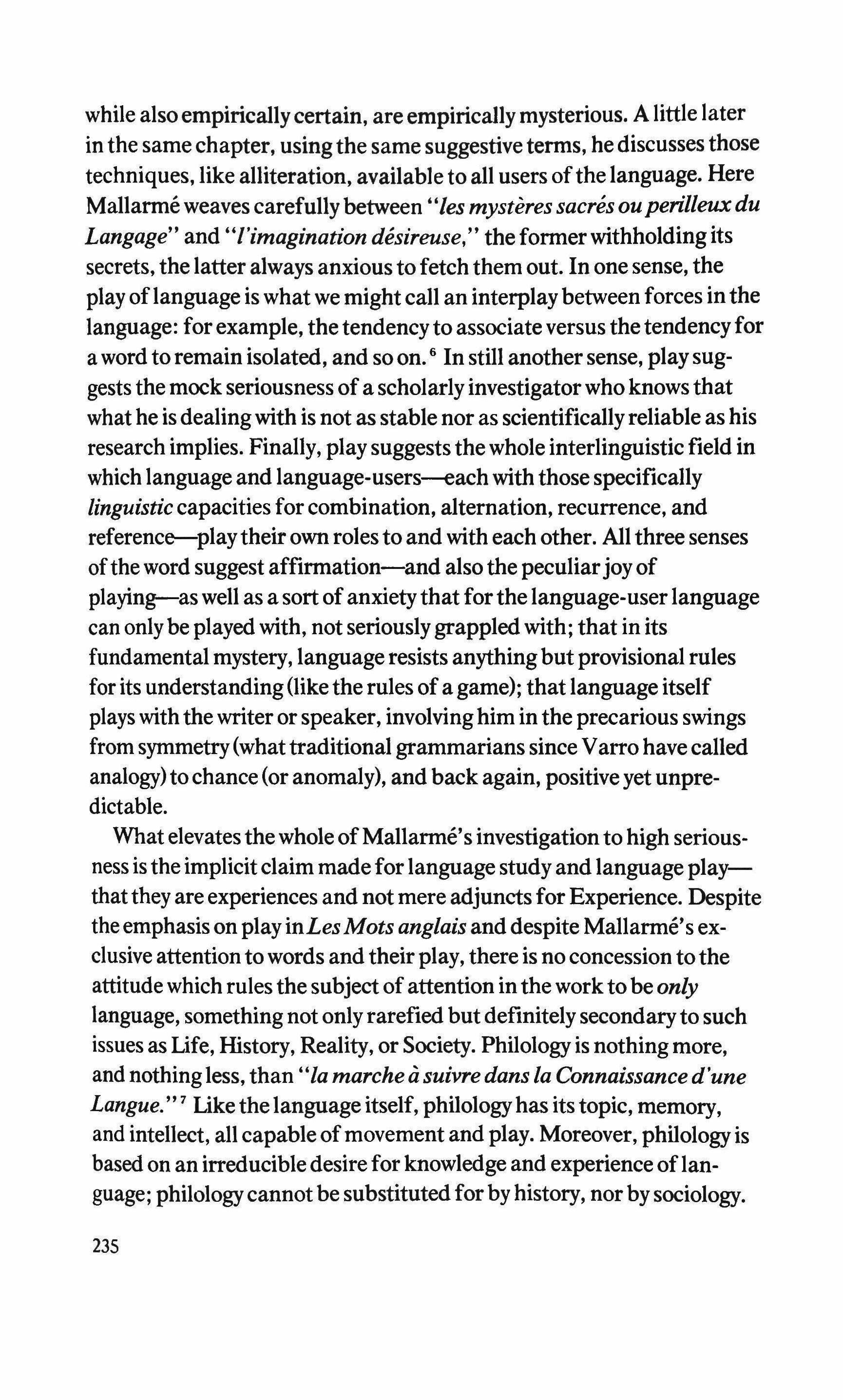
while alsoempiricallycertain, are empiricallymysterious. A little later in the same chapter, usingthe same suggestive terms, he discusses those techniques, like alliteration, available to all users ofthe language. Here Mallarme weaves carefully between" les mysteres sucres ou perilleuxdu Langage" and"/'imagination desireuse;" the formerwithholding its secrets, the latter always anxious to fetch them out. In one sense, the play oflanguage is what we might call an interplay between forces inthe language: forexample, the tendency to associate versus thetendencyfor a word to remain isolated, and so on. 6 In still another sense, playsuggests the mock seriousness of a scholarlyinvestigatorwhoknows that what he is dealingwith is not as stable nor as scientificallyreliable as his research implies. Finally, playsuggests thewhole interlinguistic field in which language and language-users---each with those specifically linguisticcapacities for combination, alternation, recurrence, and reference-playtheir own roles to and with each other. All three senses oftheword suggest affirmation-and also the peculiarjoyof playing-as well as a sort ofanxietythat forthe language-user language can onlybe playedwith, not seriouslygrappledwith; that in its fundamental mystery, language resists anythingbut provisional rules forits understanding(likethe rules of a game); that language itself plays with the writer or speaker, involvinghim in the precarious swings from symmetry(whattraditional grammarians since Varro have called analogy) to chance (oranomaly), and back again, positiveyet unpredictable.
What elevates thewhole ofMallarme's investigation to high seriousness is the implicit claim madefor language study and languageplaythat they are experiences and not mere adjuncts for Experience. Despite theemphasis on play inLesMots anglais and despite Mallarme's exclusive attention to words and their play, there is no concession to the attitude which rules the subject of attention in the workto be only language, something not onlyrarefied but definitelysecondaryto such issues as Life, History, Reality, or Society. Philology is nothing more, and nothingless, than"la marchea suivre dans la Connaissance d'une Langue." 7 Like thelanguageitself, philologyhas its topic, memory, and intellect, all capable ofmovement and play. Moreover, philologyis based on an irreducible desire for knowledge and experience oflanguage; philology cannot be substituted for byhistory, nor bysociology.
235
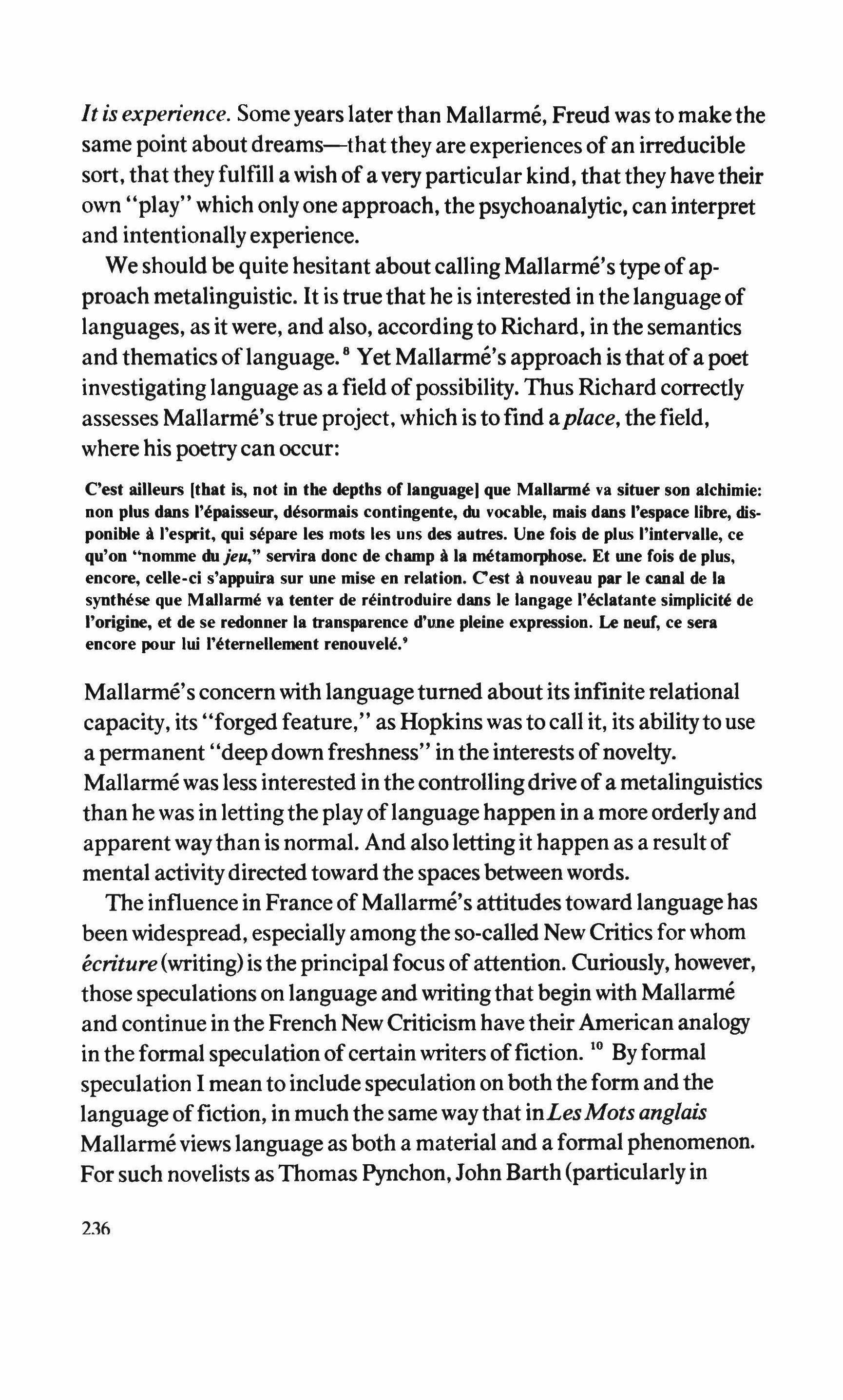
It is experience. Some years later than Mallarme, Freud was to make the same point about dreams-thatthey are experiences of an irreducible sort, that they fulfill a wish of a very particular kind, that they havetheir own "play" which only one approach, the psychoanalytic, can interpret and intentionallyexperience.
We should be quite hesitant about callingMallarme'stype ofapproachmetalinguistic. It is true that he is interested in the language of languages, as it were, and also, according to Richard, in the semantics and thematics oflanguage. 8 Yet Mallarme's approach is that of a poet investigatinglanguage as a field ofpossibility. Thus Richard correctly assesses Mallarme's true project, which is to find aplace, the field, where his poetry can occur:
C'est ailleurs [tbat is, not in tbe deptbs of languageI que Mallanne va situer son alcbimie: non plus dans I'epaisseur, desormais contingente, du vocable, mais dans I'espace Iibre, disponible • I'esprit, qui separe les mots les uns des autres. Une fois de plus I'intenalle, ce qu'on "nomme du jeu," servira donc de cbamp • la metamorphose. Et une fois de plus, encore, celle-ci s'appuira sur une mise en relation. Cest • nouveau par Ie canal de I. synthese que Mallarme va tenter de relntreduire dans Ie langage I'eelatante simplicite de I'origine, et de se redonner la transparence d'une pleine expression. Le neuf, ce sera encore pour lui I'etemellement renouvele.'
Mallarme's concern with languageturned about its infmite relational capacity, its "forged feature," as Hopkins was to call it, its abilityto use a permanent "deep down freshness" in the interests ofnovelty. Mallarme was less interested in the controllingdrive of a metalinguistics than he was in lettingthe play oflanguagehappen in a more orderly and apparent waythan is normal. And also lettingit happen as a result of mental activitydirected toward the spaces between words.
The influence in France ofMallarme's attitudestoward language has been widespread, especially among the so-called New Critics for whom ecriture (writing) is the principal focus of attention. Curiously, however, those speculations on language and writingthat begin with Mallarme and continue inthe French New Criticism have their American analogy in the formal speculation ofcertain writers offiction. 10 By formal speculation I mean to include speculation on both the form and the language offiction, in much the same way that inLesMots anglais Mallarmeviews language as both a material and a formal phenomenon. For such novelists as Thomas Pynchon, John Barth (particularly in
236
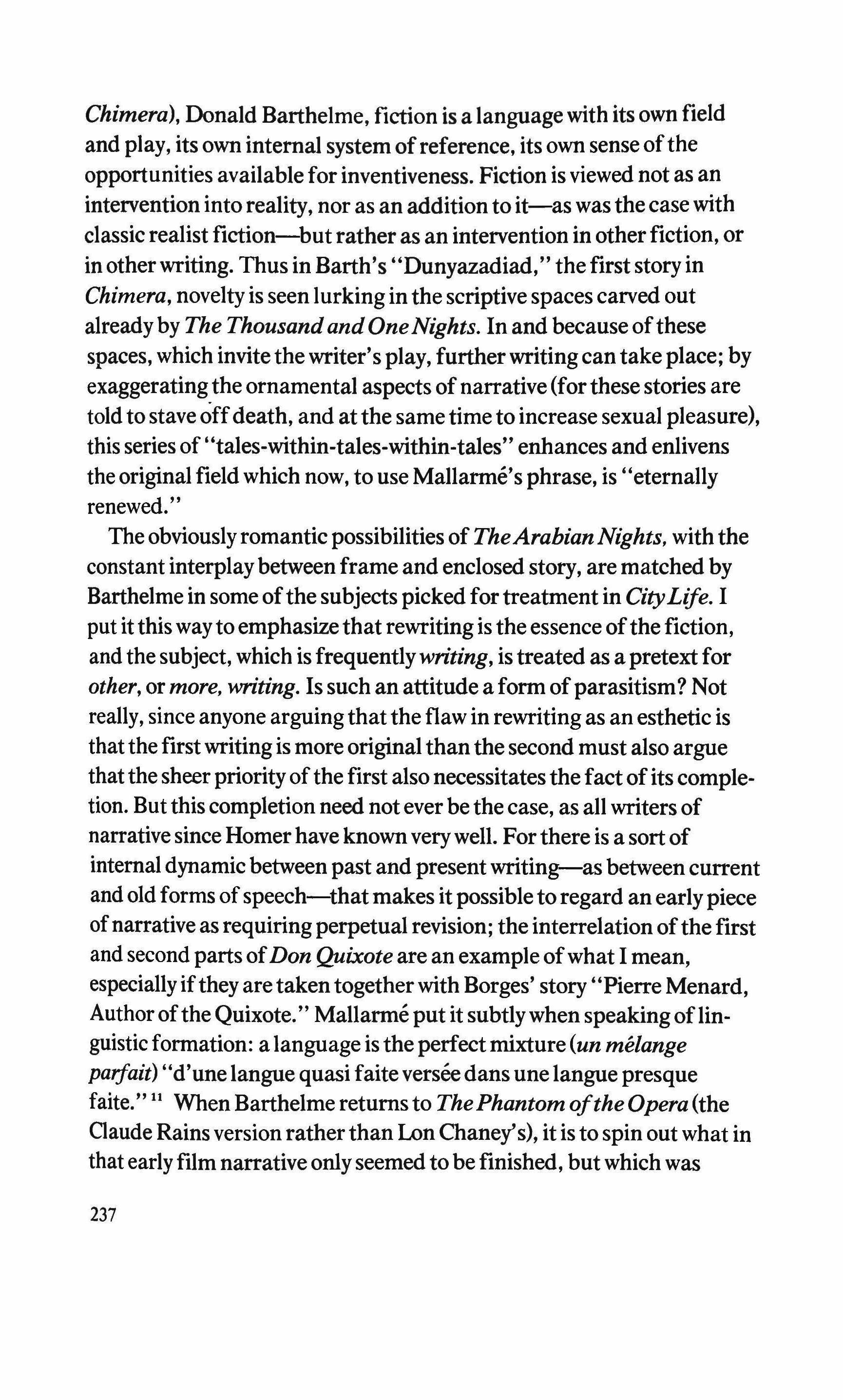
Chimera), Donald Barthelme, fiction is a language with its own field and play, its own internal system ofreference, its own sense ofthe opportunities available for inventiveness. Fiction is viewed not as an intervention into reality, nor as an addition to it-as was the case with classic realist fiction-but rather as an intervention in otherfiction, or in otherwriting. Thus in Barth's "Dunyazadiad," the first story in Chimera, novelty is seen lurking in the scriptive spaces carved out alreadyby The ThousandandOneNights. In and because ofthese spaces, which invitethe writer's play, furtherwriting can take place; by exaggeratingthe ornamental aspects ofnarrative (forthese stories are told to stave offdeath, and at the same time to increase sexual pleasure), this series of "tales-within-tales-within-tales" enhances and enlivens the original field which now, to use Mallarme's phrase, is "eternally renewed."
The obviouslyromantic possibilities of TheArabianNights, with the constant interplaybetween frame and enclosed story, are matched by Barthelme in some ofthe subjectspicked for treatment in CityLife. I put itthis wayto emphasizethat rewritingis the essence ofthe fiction, and the SUbject, which is frequentlywriting, is treated as a pretext for other, or more, writing. Is such an attitude a form ofparasitism? Not really, since anyone arguingthat the flaw in rewriting as an esthetic is thatthe firstwriting is more original thanthe second must also argue that the sheer priorityofthe first also necessitatesthe factofits completion. But this completion need not ever be the case, as all writers of narrative since Homerhave knownverywell. For there is a sort of internal dynamicbetween past and presentwriting-as between current and old forms ofspeech-that makes itpossible to regard an earlypiece ofnarrative as requiringperpetual revision; the interrelation ofthe first and second parts ofDon Quixote are an example ofwhat I mean, especiallyifthey are taken togetherwith Borges' story "Pierre Menard, Author ofthe Quixote." Mallarme put it subtlywhen speakingoflinguistic formation: a language is the perfectmixture (un melange parfait) "d'une languequasi faite verseedans une langue presque faite." 11 When Barthelme returns to ThePhantom oftheOpera(the Claude Rains version rather than Lon Chaney's), it is to spin out what in that earlyfilm narrative onlyseemed to be finished, but which was 237
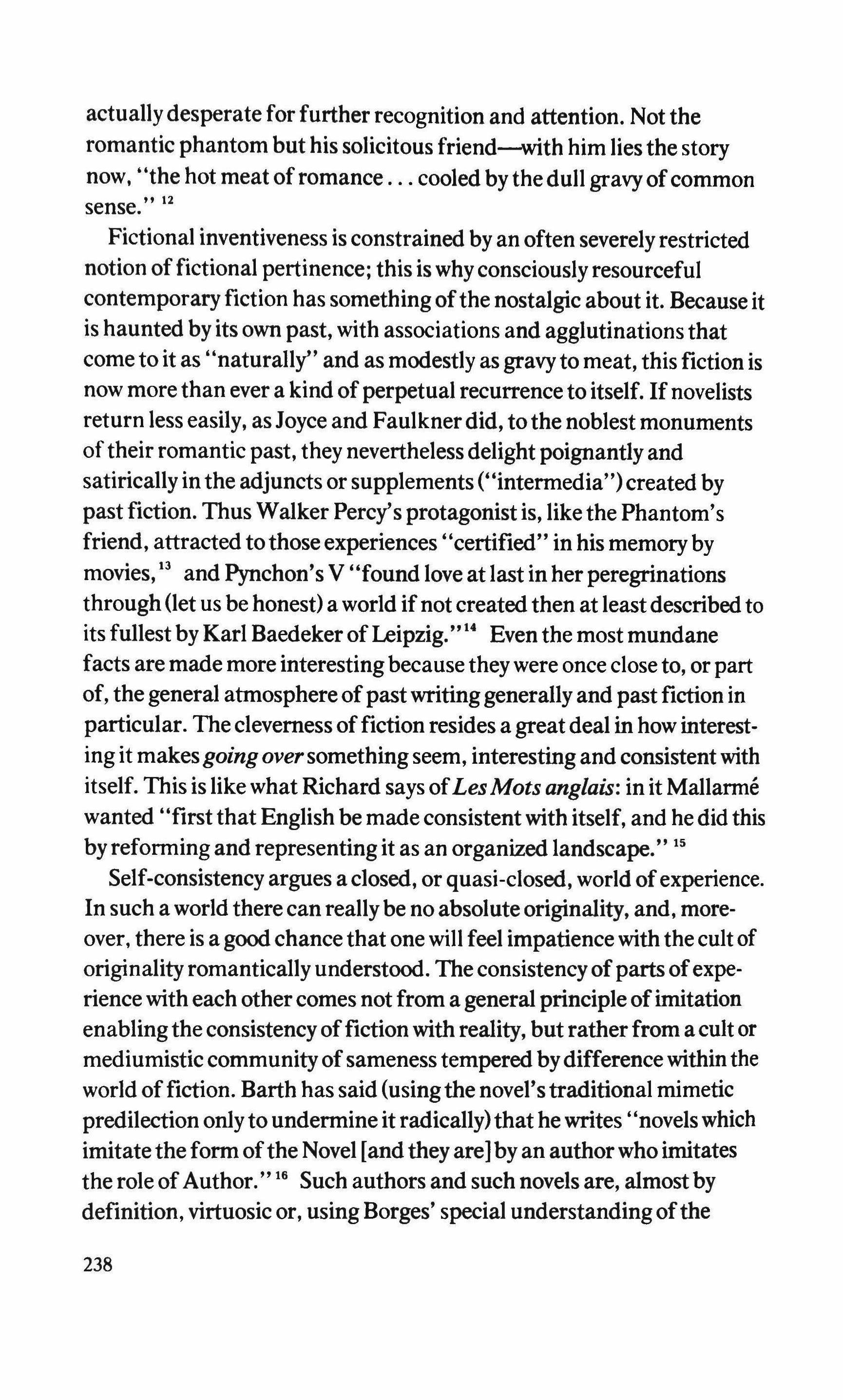
actuallydesperate for further recognition and attention. Not the romantic phantom but his solicitous friend-with him lies the story now, "the hot meat of romance cooled by thedull gravyof common sense." 12
Fictional inventiveness is constrained by an often severelyrestricted notion offictional pertinence; this is whyconsciously resourceful contemporaryfiction has something ofthe nostalgic about it. Becauseit is haunted by its own past, with associations and agglutinations that come to it as "naturally" and as modestly as gravy to meat, this fiction is now more than ever a kind ofperpetual recurrence to itself. Ifnovelists return less easily, as Joyce and Faulknerdid, to the noblest monuments of their romantic past, they nevertheless delightpoignantly and satirically inthe adjuncts or supplements("intermedia") created by past fiction. Thus Walker Percy'sprotagonistis, likethe Phantom's friend, attracted tothose experiences "certified" in his memory by movies," and Pynchon's V "found love at last in her peregrinations through(let us be honest) a world ifnot created then at leastdescribed to its fullest by Karl Baedeker ofLeipzig." 14 Even the most mundane facts are made more interesting because they were once close to, or part of, the general atmosphere ofpastwritinggenerally and past fiction in particular. The cleverness offiction resides a great deal in how interesting it makesgoing over something seem, interesting and consistent with itself. This is like what Richard says ofLesMots anglais: in it Mallarme wanted "first that English be made consistent with itself, and he did this byreforming and representing it as an organized landscape." 15
Self-consistency argues a closed, or quasi-closed, world ofexperience. In such a world there can reallybe no absolute originality, and, moreover, there is a good chance that one will feel impatience with the cultof originalityromantically understood. The consistencyofparts ofexperience with each other comes not from a generalprinciple ofimitation enablingthe consistencyoffiction with reality, but ratherfrom a cult or mediumistic community of sameness temperedbydifference withinthe world offiction. Barth has said (usingthe novel's traditional mimetic predilection only to undermine it radically)that hewrites "novels which imitate the form ofthe Novel [andtheyare]by an author who imitates the role ofAuthor." 16 Such authors and such novels are, almostby definition, virtuosic or, usingBorges' special understandingofthe
238

baroque, they assume that the possibilities of novelty have been pretty well exhausted. Barth is notablyimpressed with Borges' "libraryof Babel," for it "houses every possible combination ofalphabetical characters and spaces, and thus every possible book and statement, includingyour and my refutations and vindications, the historyofthe actual future, the historyofevery possible future. "17 The novelist confronts the world ofhisworkwith Mallarme's attitudetoward language-that it exists onlyto be reconfirmed with a maximum ofintelligence and, Barth says ofcontemporarynovelists, with "veryspecial gifts."
One ofthese gifts seems to me to be an ability to treat the past as past, as novel, and as an often peculiaramalgam ofthe familiar and the foreign. A consequence ofsuch treatment is thatthe author acts the role of an autodidact, learningthings about thepastbymakingthe past over again in his fiction. Pynchon'svisit to the Fashoda incident in V, Barth's to the mythological and fabulous past are continuous with Twain's Connecticut Yankee, whose principal purpose is to recomposethe chivalric world accordingto American drives and idioms. I thinkthat such a current is American quiteassertively, especiallywhen one remarks the comparative "extraterritoriality" 18 of some important nonAmerican recent fiction: Borges, Beckett, Naipaul, Nabokov, RobbeGrillet, and others. All fiction has a national consciousness of some sort, but in American fictionwhat impresses one is not onlythe special status assumed for "the American novel" (or even "the Great American Novel," which is a certified phraseenjoyingprivileged standing) butthe notion thatAmericanfiction, more than fiction generally, is a particularlyaptfictionalextension ofpast fiction. Just bybeing American-as in Chimera Barth himselfappears as a genie to the Arabian Nights narrators--one can enter thediscursiveworld ofpast fiction with notable ease. This is like Mallarme, the Frenchman, regardingEnglish as theplace inwhich the Battle of Hastings is still beingfought. Fiction as text. Ever sinceJames, Conrad, and Joyce, many novelists have incorporated intotheirwork an exacerbated awareness thatwhat they are producingis a formal text, not a piece ofmusic or a collection ofwords heldtogetherby a story. The lateJamesian novel exceeds the ordinaryintercourse ofeveryday life because it is a written text that formally assembles what, in spokenlanguage, itwould not have been
239
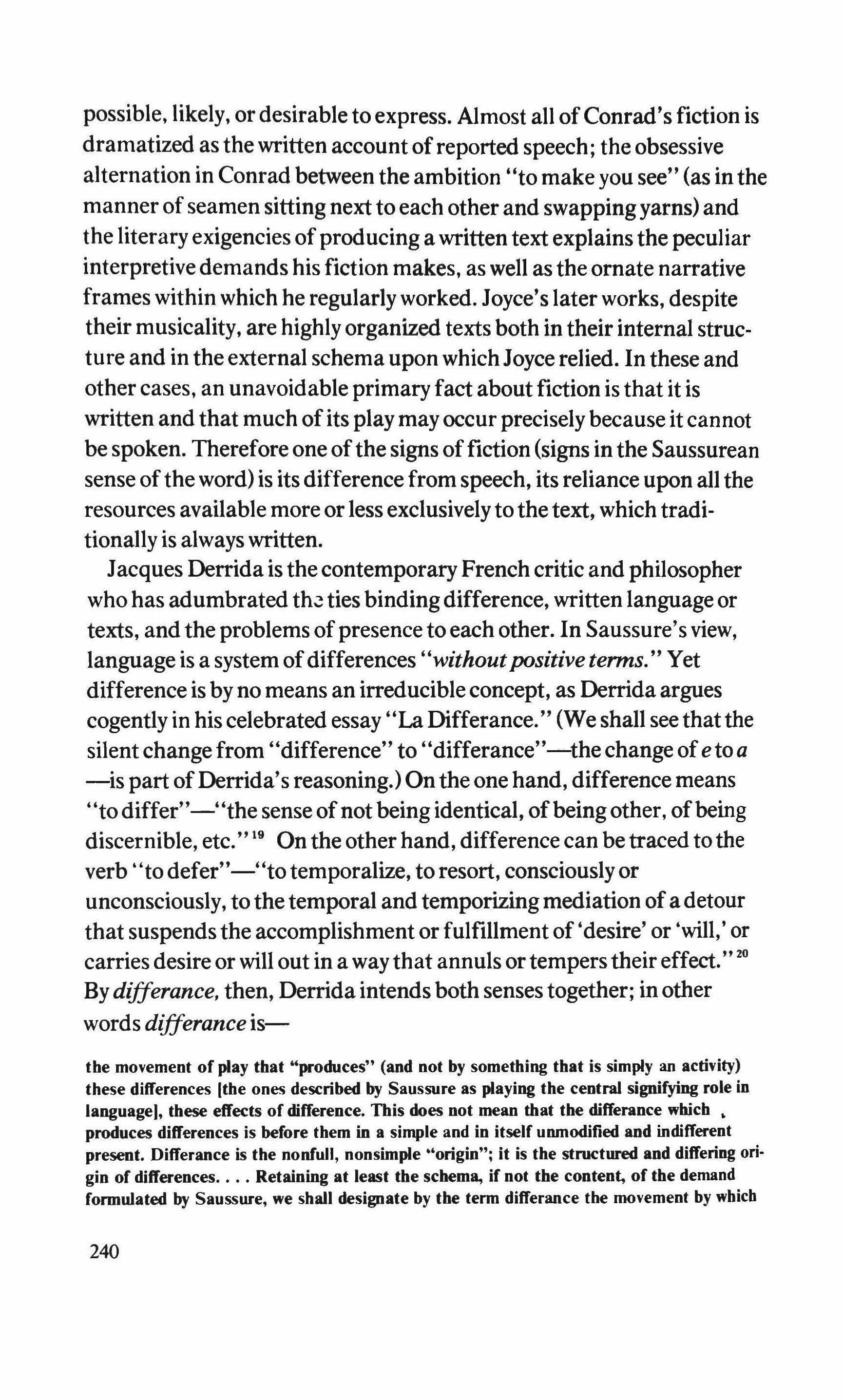
possible, likely, or desirable to express. Almost all ofConrad's fiction is dramatized as the written account ofreported speech; the obsessive alternation in Conrad between the ambition "to make you see" (as inthe manner of seamen sitting next to each other and swappingyarns) and the literaryexigencies ofproducing a written text explains the peculiar interpretive demands his fiction makes, as well as the ornate narrative frames within which he regularly worked. Joyce's later works, despite their musicality, are highlyorganized texts both in their internal structure and in the external schema upon which Joyce relied. In these and other cases, an unavoidable primary fact about fiction is that it is written and that much ofits play may occur precisely because it cannot be spoken. Therefore one ofthe signs offiction (signs in the Saussurean sense oftheword) is its difference from speech, its reliance upon all the resources available more or less exclusivelyto thetext, which traditionally is always written.
Jacques Derrida is thecontemporary French critic and philosopher who has adumbrated the ties bindingdifference, written language or texts, and the problems ofpresence to each other. In Saussure's view, language is a system ofdifferences "withoutpositive terms. Yet difference is by no means an irreducible concept, as Derrida argues cogently in his celebrated essay "La Differance." (We shall see thatthe silent change from "difference" to "differance"-the change of e to a -is part ofDerrida's reasoning.) Onthe one hand, difference means "to differ"-' 'the sense ofnot beingidentical, ofbeingother, ofbeing discernible, etc." 19 On the other hand, difference can be traced to the verb "to defer"-"to temporalize, to resort, consciously or unconsciously, to thetemporal and temporizingmediation of a detour that suspendsthe accomplishment or fulfillment of 'desire' or 'will,' or carries desire or will out in a way that annuls or tempers their effect." 20 Bydifferance, then, Derrida intends both senses together; in other words differance isthe movement of play that "produces" (and not by something that is simply an activity) these differences [the ones described by Saussure as playing the central signifying role in language], these effects of difference. This does not mean that the differance which produces differences is before them in a simple and in itself unmodified and indifferent present. Differance is the nonfull, nonsimple "origin"; it is the structured and differing origin of differences Retaining at least the schema, if not the content, of the demand formulated by Saussure, we shall designate by the term differance the movement by which
240
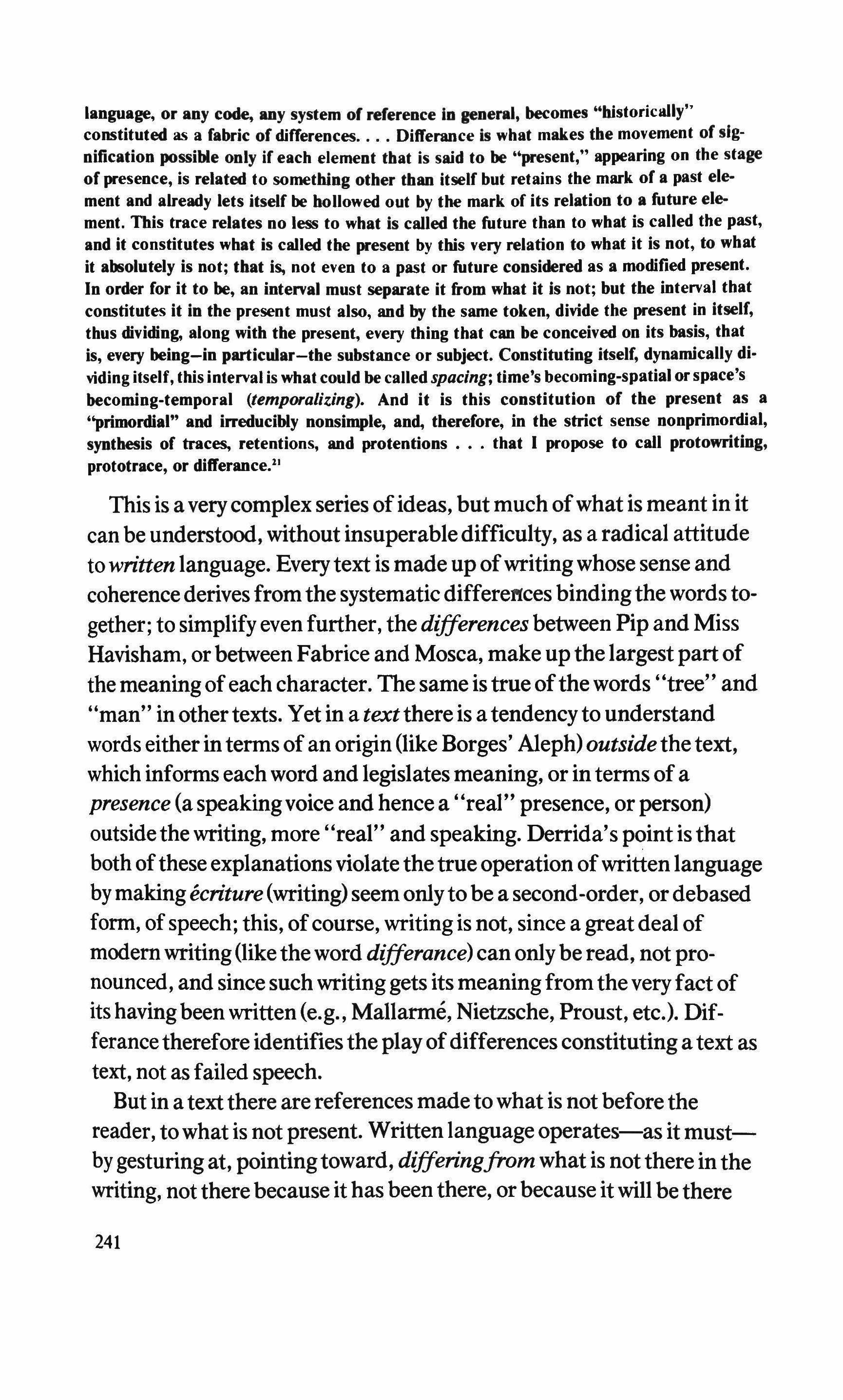
language, or any code, any system of reference in general, becomes "historically" constituted as a fabric of differences Difrerance is what makes the movement of signification possible only if each element that is said to be "present," appearing on the stage of presence, is related to something other than itself but retains the mark of a past element and already lets itself be hollowed out by the mark of its relation to a future element. This trace relates no less to what is called the future than to what is called the past, and it constitutes what is called the present by this very relation to what it is not, to what it absolutely is not; that is, not even to a past or future considered as a modified present. In order for it to be, an interval must separate it from what it is not; but the interval that constitutes it in the present must also, and by the same token, divide the present in Itself, thus dividing, along with the present, every thing that can be conceived on its basis, that is, every being-in particular-the substance or subject. Constituting itself, dynamically dividing itself, this interval is what could be called spacing; time's becoming-spatial or space's becoming-temporal (temporalizing). And it is this constitution of the present as a ''primordial'' and irreducibly nonsimple, and, therefore, in the strict sense nonprimordial, synthesis of traces, retentions, and protentions that I propose to call protowriting, prototrace, or difrerance."
This is a verycomplex series ofideas, but much ofwhat is meant in it can be understood, without insuperabledifficulty, as a radical attitude to written language. Everytext is made up ofwritingwhose sense and coherence derives from the systematicdifferences bindingthe words together; to simplify even further, the differences between Pip and Miss Havisham, or between Fabrice and Mosca, make up the largestpartof themeaningofeach character. The same is true ofthe words''tree" and "man" in other texts. Yet in a text thereis a tendency to understand words either in terms of an origin(like Borges' Aleph)outsidethetext, which informs each word and legislatesmeaning, or in terms of a presence (aspeakingvoice and hence a "real" presence, or person) outsidethewriting, more "real" and speaking. Derrida's point isthat both ofthese explanations violate the true operation ofwritten language bymaking ecriture(writing) seem onlyto be a second-order, or debased form, of speech; this, of course, writing is not, since a greatdeal of modernwriting(likethe word differance) can onlybe read, not pronounced, and since such writinggets its meaningfromthe very fact of its havingbeen written (e.g., Mallarme, Nietzsche, Proust, etc.). Differancetherefore identifies the playofdifferences constituting a text as text, not as failed speech.
But in a text there are references made to what is not before the reader, to what is not present. Written languageoperates-as it mustbygesturingat, pointingtoward, differingfrom what is not there inthe writing, not there because it has been there, or because it will be there
241
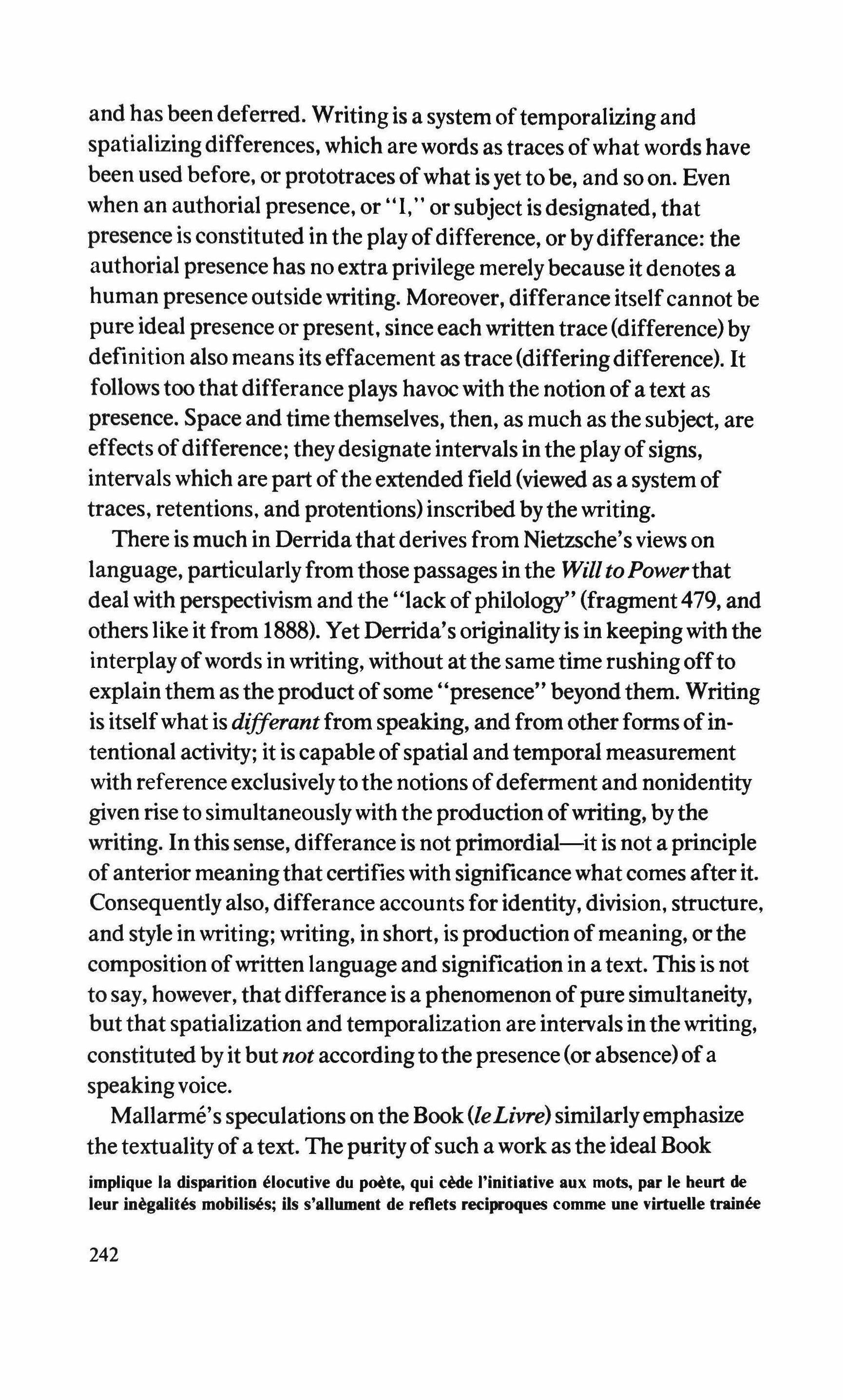
and has been deferred. Writing is a system oftemporalizing and spatializingdifferences, which are words as traces ofwhat words have been used before, or prototraces ofwhat isyet to be, and so on. Even when an authorial presence, or "1," or subject is designated, that presence is constituted in the playofdifference, or bydifferance: the authorial presence has no extra privilege merelybecause it denotes a human presence outside writing. Moreover, differance itself cannot be pure ideal presence or present, since each written trace (difference)by definition also means its effacement as trace (differingdifference). It follows too that differance plays havocwith the notion of a text as presence. Space and time themselves, then, as much as the subject, are effects ofdifference; theydesignate intervals in the playofsigns, intervals which are part ofthe extended field (viewed as a system of traces, retentions, and protentions) inscribed bythe writing. There is much in Derrida that derives from Nietzsche'sviews on language, particularlyfrom those passages in the Will to Powerthat deal with perspectivism and the "lack of philology" (fragment479, and others like it from 1888). Yet Derrida's originality is in keepingwith the interplayofwords in writing, without at the same time rushing offto explain them as the product of some "presence" beyond them. Writing is itselfwhat is differantfrom speaking, and from otherforms ofintentional activity; it is capable of spatial and temporal measurement with reference exclusivelyto the notions ofdeferment and nonidentity given rise to simultaneouslywith the production ofwriting, bythe writing. In this sense, differance is not primordial-it is not a principle of anterior meaningthat certifies with significance what comes after it. Consequentlyalso, differance accounts for identity, division, structure, and style in writing; writing, in short, is production ofmeaning, or the composition ofwritten language and signification in a text. This is not to say, however, that differance is a phenomenon ofpure simultaneity, butthat spatialization and temporalization are intervals inthewriting, constituted byit but not accordingtothe presence (orabsence) of a speakingvoice.
Mallarme's speculations on the BookileLivre)similarlyemphasize the textuality of a text. The purity ofsuch a work as the ideal Book implique la disparition elocutbe du poete, qui cede I'initiative aux mots, par Ie beurt de leur inegaIites mobillses; iIs s'allument de reflets reciproques comme une virtuelle trainee
242
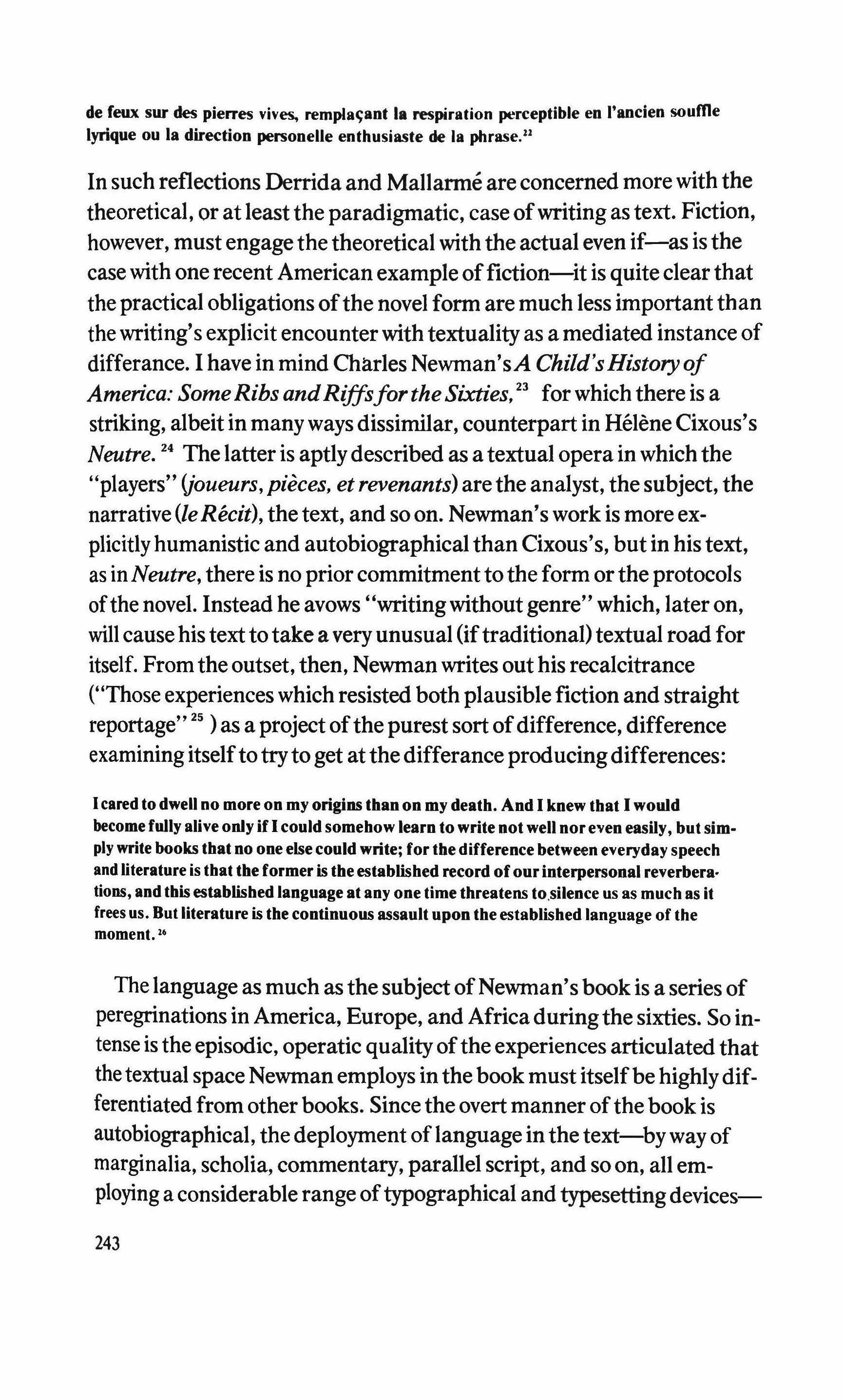
de feux sur des pierres vives, remplac;ant I. respiration perceptible en I'ancien souffie Iyrique ou la direction personelle enthusiaste de la phrase. U
In such reflections Derrida and Mallarme are concerned more with the theoretical, or at leastthe paradigmatic, case ofwriting as text. Fiction, however, must engage the theoretical with the actual even if-as is the case with one recent American example offiction-it is quite clear that the practicalobligations ofthe novel form are much less important than thewriting'sexplicit encounter with textuality as a mediated instance of differance. I have in mind Charles Newman'sA Child'sHistoryof America: SomeRibs andRiffsfortheSixties, 23 forwhich there is a striking, albeit in many ways dissimilar, counterpart in Helene Cixous's Neutre. 24 The latter is aptlydescribed as a textual opera in which the "players" (joueurs,pieces, et revenants) are the analyst, the subject, the narrative (IeRecit), thetext, and so on. Newman's work is more explicitly humanistic and autobiographical than Cixous's, but in his text, as inNeutre, there is no prior commitment to the form or the protocols ofthe novel. Instead he avows "writingwithout genre" which, later on, will cause his text to take a very unusual (iftraditional) textual road for itself. From the outset, then, Newman writes out his recalcitrance ("Those experiences which resisted both plausible fiction and straight reportage" 25 ) as a project ofthe purest sort ofdifference, difference examining itselfto tryto get atthedifferance producingdifferences:
I cared to dwell no more on my origins than on my death. And I knew that I would become fully alive only if I could somehow learn to write not well nor even easily, but simply write books that no one else could write; for the difference between everyday speech and literature is that the former is the established record of our interpersonal reverberations, and tbis established language at anyone time threatens to.silence us as much as it frees us. But literature is the continuous assault upon the established language of the moment."
Thelanguage as much as the subject ofNewman's book is a series of peregrinations in America, Europe, and Africaduringthe sixties. So intense is the episodic, operatic quality ofthe experiences articulated that thetextual space Newman employs inthe book must itselfbe highlydifferentiated from other books. Since the overt manner ofthebook is autobiographical, the deployment of language inthe text-byway of marginalia, scholia, commentary, parallelscript, and so on, all employing a considerable range oftypographical and typesettingdevices-
243
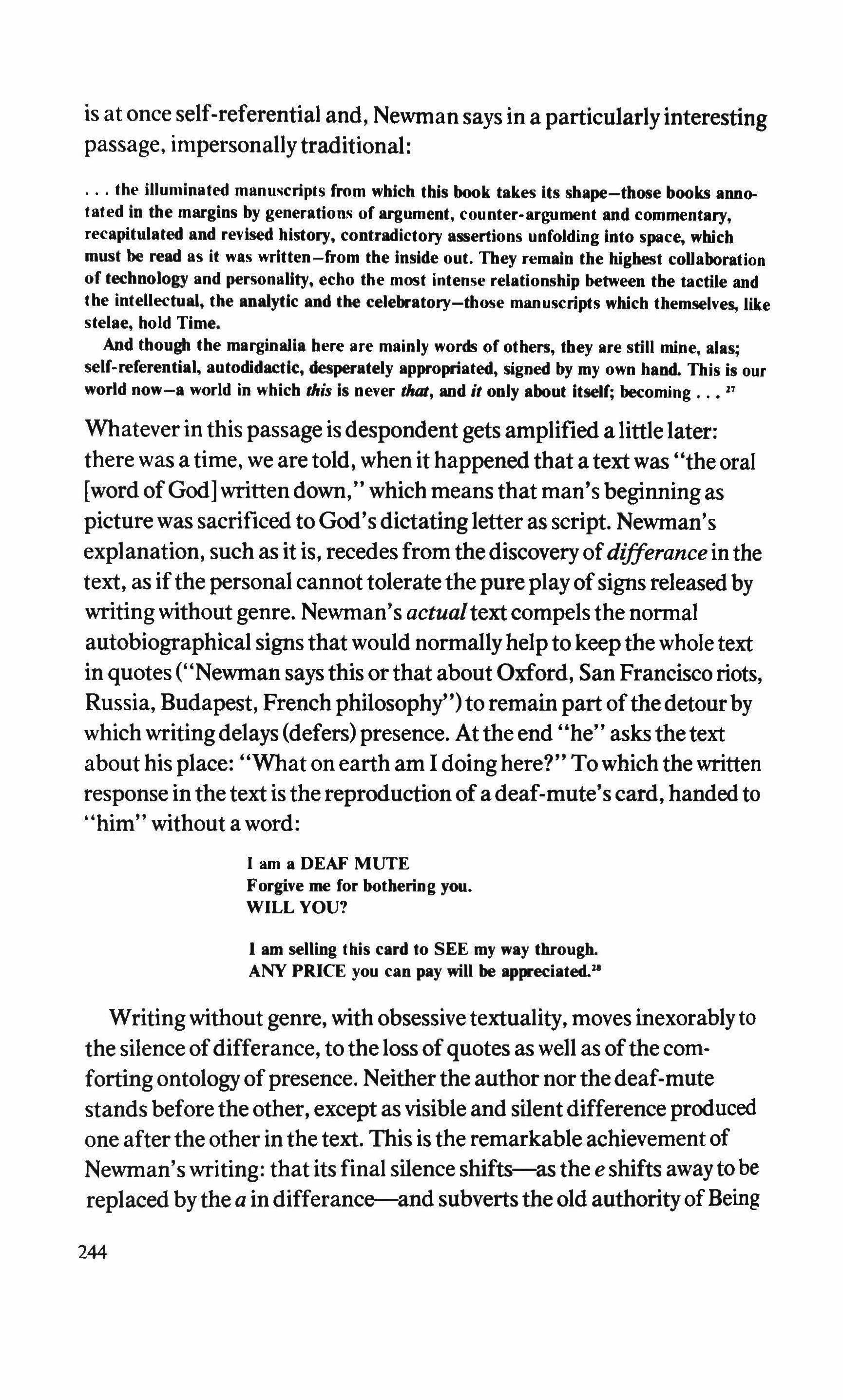
is at once self-referential and, Newman says in a particularlyinteresting passage, impersonallytraditional:
the illuminated manuscripts from which this book takes its shape-those books annotated in the margins by generations of argument, counter-argument and commentary, recapitulated and revised history, contradictory assertions unfolding into space, which must be read as it was written-from the inside out. They remain the highest coUaboration of technology and personality, echo the most intense relationship between the tactile and the intellectual, the analytic and the celebratory-those manuscripts which themselves, like stelae, hold Time.
And though the marginalia here are mainly words of others, they are still mine, alas; self-referential, autodidactic, desperately appropriated, signed by my own hand. This is our world now-a world in which this is never tIuIt, and it only about itself; becoming 17
Whatever in this passage is despondent gets amplified a little later: there was a time, we are told, when it happened that a text was "the oral [word of God] written down," which means that man's beginning as picture was sacrificed to God's dictatingletter as script. Newman's explanation, such as it is, recedes from thediscoveryofdifferance in the text, as ifthe personal cannot tolerate the pure playofsigns released by writingwithout genre. Newman's actualtext compels the normal autobiographical signs that would normallyhelp to keepthe whole text in quotes("Newman says this or that about Oxford, San Francisco riots, Russia, Budapest, French philosophy") to remain part ofthedetourby which writingdelays (defers) presence. Atthe end "he" asks the text about his place: "What on earth am I doing here?" Towhich the written response in the text is the reproductionofadeaf-mute's card, handed to "him" without a word:
I am a DEAF MUTE
Forgive me for bothering you. WILL YOU?
I am selling this card to SEE my way through. ANY PRICE you can pay will be appreciated.11
Writingwithout genre, with obsessive textuality, moves inexorablyto the silence ofdifferance, to the loss ofquotes as well as ofthe comfortingontologyofpresence. Neitherthe author nor thedeaf-mute stands before the other, except as visible and silentdifference produced one afterthe other inthe text. This is the remarkable achievement of Newman'swriting: that its final silence shifts-as the e shifts awayto be replaced bythe a in differance-and subvertsthe old authority ofBeing
244
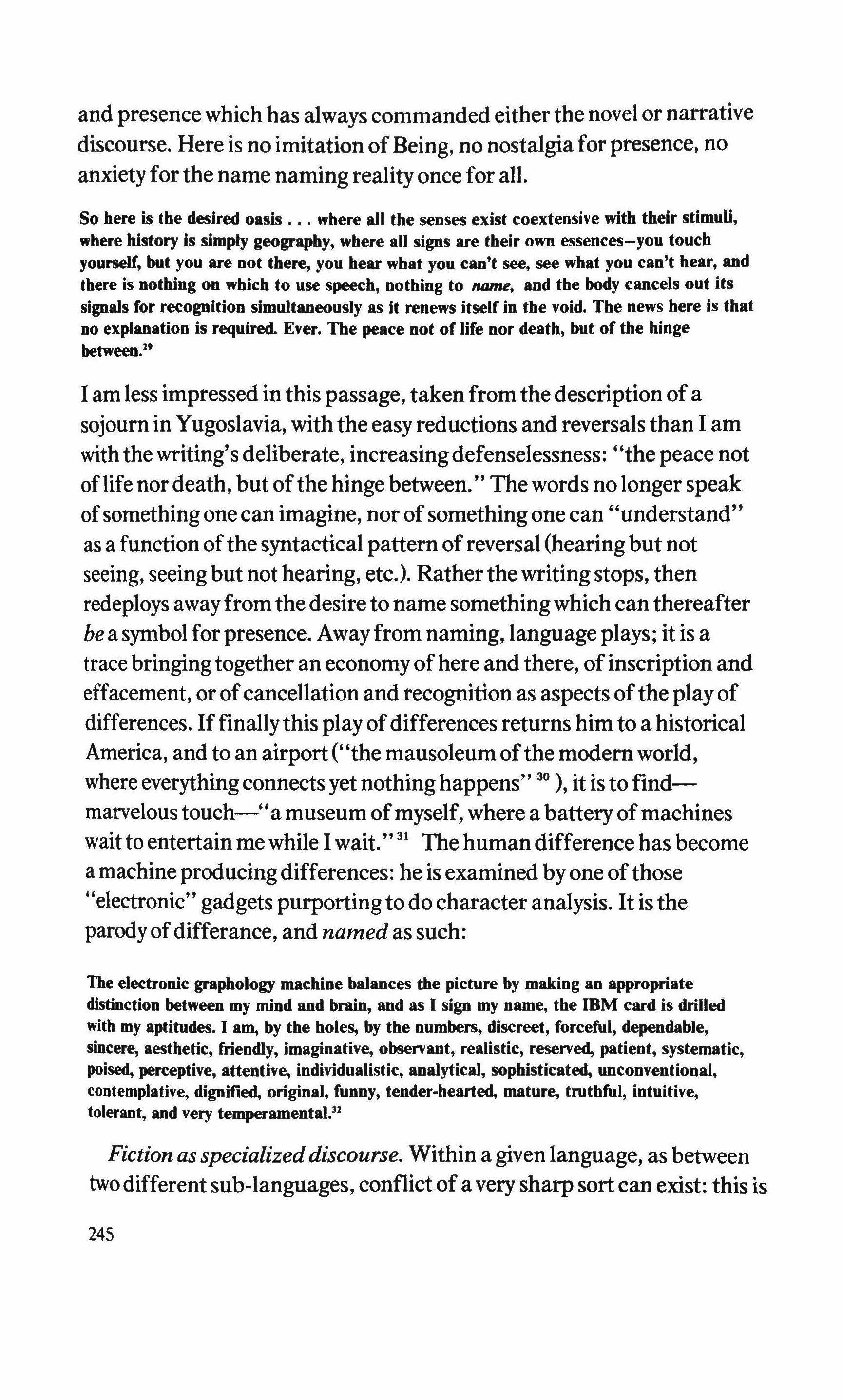
and presence which has always commanded either the novel or narrative discourse. Here is no imitation ofBeing, no nostalgia for presence, no anxietyforthe name namingreality once for all.
So here is the desired oasis where all the senses exist coextensive with their stimuli, where history is simply geography, where all signs are their own essences-you touch yourself, but you are not there, you hear what you can't see, see what you can't hear, and there is nothing on which to use speech, nothing to name, and the body cancels out its signals for recognition simultaneously as it renews itself in the void. The news here is that no explanation is required. Ever. The peace not of life nor death, but of the hinge between."
I am less impressed inthis passage, taken from thedescription of a sojourn in Yugoslavia, with the easy reductions and reversals than I am with the writing'sdeliberate, increasingdefenselessness: "the peace not oflife nor death, but ofthe hinge between." The words no longerspeak ofsomething one can imagine, nor of something one can "understand" as a function ofthe syntactical pattern ofreversal (hearingbut not seeing, seeingbut not hearing, etc.). Ratherthe writingstops, then redeploys awayfromthedesire to name somethingwhich can thereafter be a symbol forpresence. Awayfrom naming, languageplays; it is a trace bringingtogether an economy ofhere and there, ofinscription and effacement, or ofcancellation and recognition as aspects ofthe playof differences. Iffinallythis playofdifferences returns him to a historical America, and to an airport("the mausoleum ofthe modernworld, where everything connects yetnothinghappens" 30 ), it is to findmarvelous touch-"amuseum ofmyself, where a batteryofmachines wait to entertain me while I wait." 31 The human difference has become a machine producingdifferences: he is examined by one ofthose "electronic" gadgetspurporting to do character analysis. It is the parody ofdifferance, and named as such:
The electronic graphology machine balances the picture by making an appropriate distinction between my mind and brain, and as I sign my name, the IBM card is drilled with my aptitudes. I am, by the holes, by the numbers, discreet, forceful, dependable, sincere, aesthetic, friendly, imaginative, observant, realistic, reserved, patient, systematic, poised, perceptive, attentive, individualistic, analytical, sophisticated, unconventional, contemplative, dignified, original, funny, tender-hearted, mature, truthful, intuitive, tolerant, and very temperamental!'
Fiction as specializeddiscourse. Within a givenlanguage, as between twodifferent sub-languages, conflict of a very sharp sort can exist: this is
245
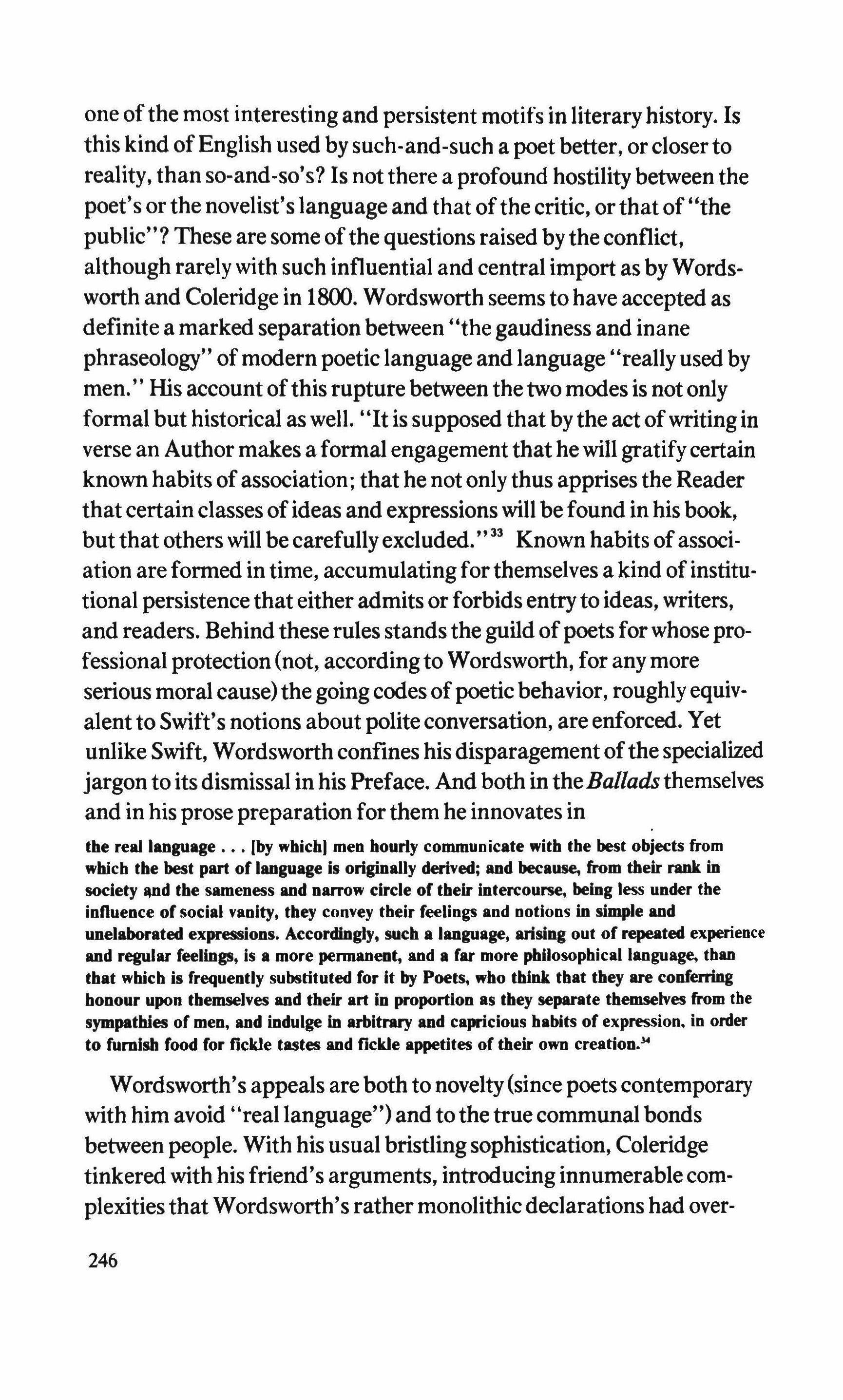
one ofthe most interesting and persistent motifs in literaryhistory. Is this kind ofEnglish used by such-and-such a poet better, or closer to reality, than so-and-so's? Is not there a profound hostilitybetween the poet's or the novelist's language and that ofthe critic, or that of"the public"? These are some ofthe questions raised bythe conflict, although rarely with such influential and central import as by Wordsworth and Coleridge in 1800. Wordsworth seems to have accepted as definite a marked separation between "the gaudiness and inane phraseology" ofmodern poeticlanguage and language "really used by men." His account ofthis rupture between the two modes is not only formal but historical as well. "It is supposed that bythe act ofwritingin verse an Author makes a formal engagementthat he will gratifycertain known habits ofassociation; that he not only thus apprises the Reader that certain classes ofideas and expressions will be found in his book, but that others will be carefullyexcluded." 33 Known habits ofassociation are formed in time, accumulating forthemselves a kind ofinstitutional persistence that either admits or forbids entry to ideas, writers, and readers. Behind these rules standsthe guild ofpoets forwhose professional protection(not, accordingto Wordsworth, for any more serious moral cause)the going codes ofpoeticbehavior, roughlyequivalent to Swift's notions about politeconversation, are enforced. Yet unlike Swift, Wordsworth confines his disparagement ofthe specialized jargon to its dismissal in his Preface. And both in theBallads themselves and in his prose preparation forthem he innovates in the real language (by whicbl men hourly communicate with tbe best objects from whicb tbe best part of language is originally derived; and because, from their rank in society and the sameness and narrow circle of their intercourse, being less under tbe influence of social vanity, they convey tbeir feelings and notions in simple and unelaborated expressions. Accordingly, such a language, arising out of repeated experience and regular feelings, is a more permanent, and a far more philosopbicallanguage, tban that whicb is frequently substituted for it by Poets, wbo think tbat they are conferring honour upon themselves and their art In proportion as tbey separate themselves from tbe sympathies of men, and indulge In arbitrary and capricious babits of expression, in order to furnish food for fickle tastes and fickle appetites of tbeir own creation
Wordsworth's appeals are both to novelty(since poets contemporary with him avoid "real language") and to the true communal bonds between people. With his usual bristlingsophistication, Coleridge tinkered with his friend's arguments, introducing innumerable complexities that Wordsworth's rather monolithicdeclarations had over-
246
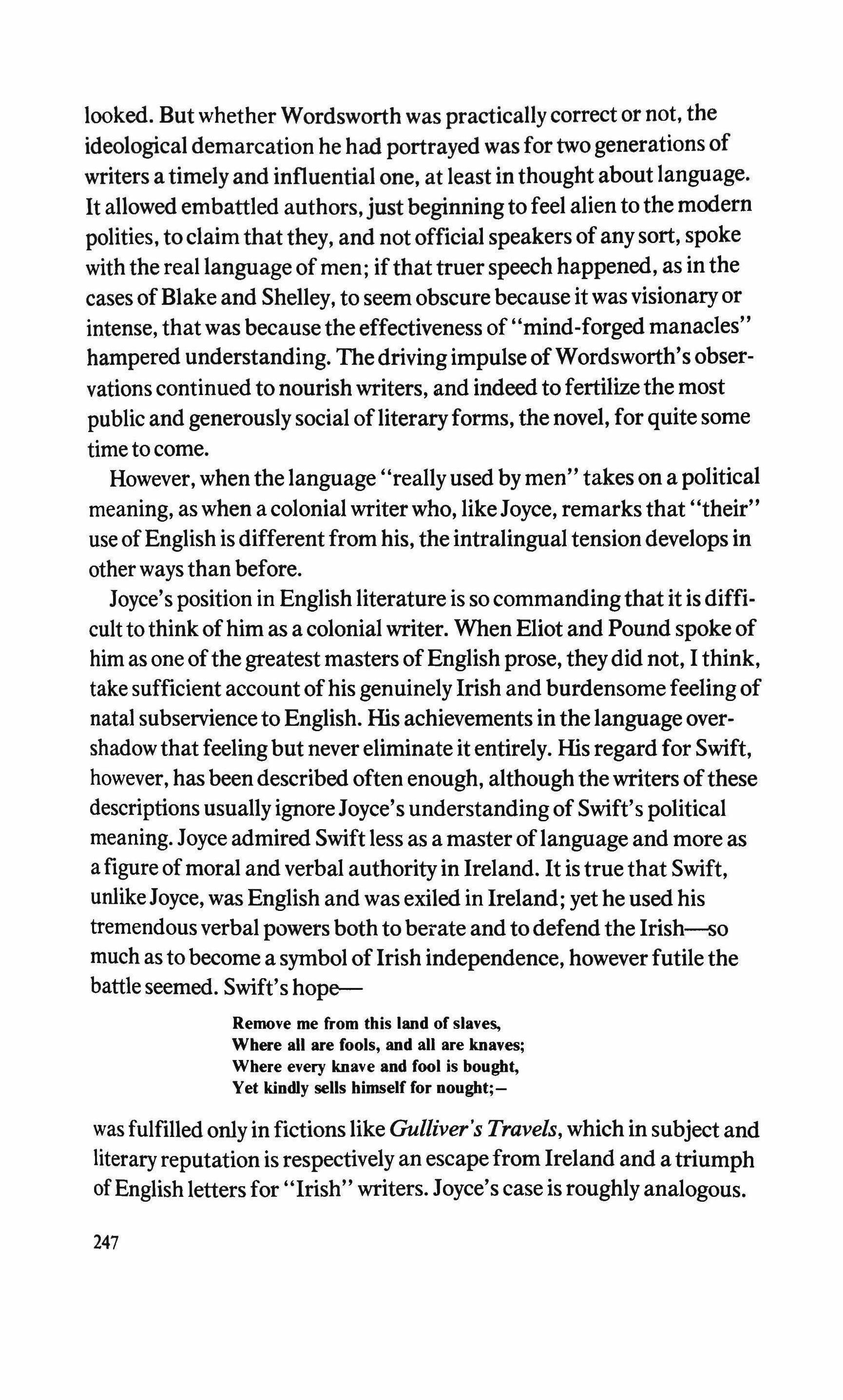
looked. But whether Wordsworth was practically correct or not, the ideological demarcation he had portrayed was for two generations of writers a timelyand influential one, at least in thought about language. It allowed embattled authors,justbeginning to feel alien to the modern polities, to claim that they, and not official speakers of any sort, spoke with the real language of men; ifthat truer speechhappened, as in the cases of Blake and Shelley, to seem obscure because it was visionary or intense, that was because the effectiveness of "mind-forged manacles" hampered understanding. ThedrivingimpulseofWordsworth's observations continued to nourish writers, and indeed to fertilize the most public and generously social ofliteraryforms, the novel, for quite some time to come.
However, when the language "reallyused by men" takes on a political meaning, as when a colonial writerwho, likeJoyce, remarks that "their" use ofEnglish is different from his, the intralingual tension develops in other ways than before.
Joyce'sposition in English literature is so commandingthat it is difficult to thinkofhim as a colonial writer. When Eliot and Pound spoke of him as one ofthe greatest masters ofEnglish prose, theydid not, I think, take sufficient account ofhis genuinely Irish and burdensome feeling of natal subservience to English. His achievements in the language overshadowthat feelingbut never eliminate it entirely. His regard for Swift, however, has beendescribed often enough, although thewriters ofthese descriptionsusuallyignoreJoyce'sunderstanding of Swift's political meaning.Joyce admired Swift less as a master oflanguage and more as a figure ofmoral and verbal authorityin Ireland. It is true that Swift, unlikeJoyce, was English and was exiled in Ireland; yet he used his tremendous verbal powers both to berate and to defend the Irish--so much as to become a symbol of Irish independence, however futile the battle seemed. Swift's hope-
Remove me from this land of slaves, Where all are fools, and all are knaves; Where every knave and fool is bought, Yet kindly sells himself for nought;was fulfilled only in fictions like Gulliver's Travels, which in subject and literaryreputation is respectively an escape from Ireland and a triumph ofEnglish letters for "Irish" writers. Joyce's case is roughlyanalogous.
247

His works are read as part of English literature, despite a frequently overwhelming sense of Irish colonial pathos exuded bythem.
Only a colonial writer can have as complex an awareness ofthe circles ofcamaraderie and isolation, of interlocking groups of provincial club members and lonely outcasts (often the same people), ofgarrulous native communitymuffling vast nativedespair and even vacancy, as Joyce did. His choice for the role ofall-round man is a DiasporaJew, a man both more and less a citizen ofDublin than anyone else in Ulysses; the intricacy ofthis man's position is further stressed bycomparison with Odysseus, since Bloom maneuvers his way around Dublin as skillfully as the clever Greekdid in his world, but he is vulnerable spiritually and in his home (Dublin or Eccles Street) as Odysseus was not in Ithaca. Nevertheless Bloom's plight severely and objectivelyreflects the, to Joyce, greater intimacy ofIrish despondency to be found in Stephen Dedalus. The openingchapterof Ulyssesfullyexposes thetreacherous webs in which Stephen feels himselfcaught. Steeped in English literature and Irish traditions, "grown out ofWilde and paradoxes," Stephen calls himselfthe servant oftwo masters, the Imperial British state and the holy Roman Catholic and Apostolic Church. Between Haines's Englishpatronizing and Mulligan's sporty Irish sentimentalism, Dedalus must bearthe weight of a native's hauntinginferiority and an artist's pride. This has never beeneasy for him. Yet since he can accept Irish neither as a language nor as a nationality(the old milk-woman represents both: "A wandering crone, lowlyform of an immortal serving her conqueror and her gaybetrayer, their common cuckquearun a messengerfrom the secret morning. To serve or to upbraid, whetherhe could not tell: but scorned to beg her favor." 35 He must make his own way. This is a source ofhis bitterness, that of a writerforced to use a language not his, forced to run the risk ofcreating an art that seems servilely to imitate accepted British originals. "Drawingback and pointing, Stephen said with bitterness:-It is a symbol of Irish art. The cracked lookingglass of a servant." 36
While Joyceobviously sees himself in Stephen, he also protects himselffrom the latter's cripplingself-pity. As a result, Stephen's personality is allowed to develop characteristics like melodramatic posturing, grandiose and inflated projections ofitself, and spiritual afftliations whose radical importJoyceaccepted in a more insinuatingway.
248
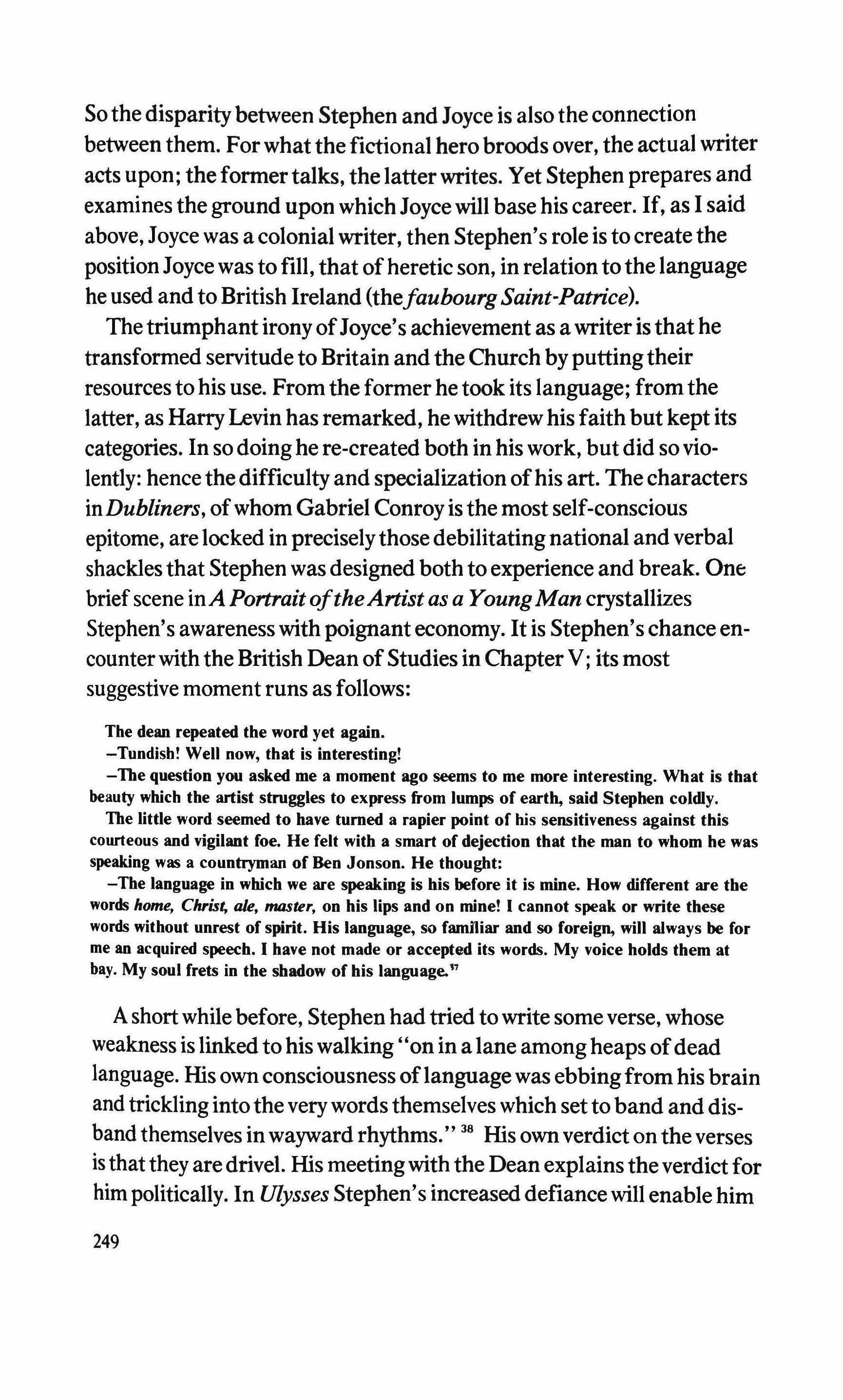
Sothe disparitybetween Stephen and Joyce is also theconnection between them. Forwhat the fictional hero broods over, the actual writer acts upon; theformertalks, the latterwrites. Yet Stephen prepares and examines the ground upon which Joycewill base his career. If, as I said above, Joyce was a colonial writer, then Stephen's role is to create the positionJoyce was to fill, that ofheretic son, in relation to the language he used and to British Ireland (thefaubourgSaint-Patrice).
ThetriumphantironyofJoyce's achievement as a writer is that he transformed servitude to Britain and the Church byputtingtheir resources to his use. From the former he took its language; fromthe latter, as Harry Levin has remarked, he withdrewhis faith but kept its categories. In so doinghe re-created both in his work, but did so violently: hence thedifficulty and specialization ofhis art. The characters inDubliners, ofwhom Gabriel Conroyis the most self-conscious epitome, are locked in preciselythose debilitatingnational and verbal shackles that Stephen was designed both to experience and break. One brief scene inA PortraitoftheArtist as a YoungMan crystallizes Stephen's awareness with poignant economy. It is Stephen's chance encounter with the British Dean ofStudies in ChapterV; its most suggestive moment runs as follows:
The dean repeated the word yet again.
-Tundish! Well now, that is interesting!
-The question you asked me a moment ago seems to me more interesting. What is that beauty which the artist struggles to express from lumps of earth, said Stephen coldly.
The little word seemed to have turned a rapier point of his sensitiveness against this courteous and vigilant foe. He felt with a smart of dejection that the man to whom he was speaking was a countryman of Ben Jonson. He thought:
-The language in which we are speaking is his before it is mine. How different are the words home, Christ; ale, master, on his lips and on mine! I cannot speak or write these words without unrest of spirit. His language, so familiar and so foreign, will always be for me an acquired speech. I have not made or accepted its words. My voice holds them at bay. My soul frets in the shadow of his language."
A shortwhile before, Stephen had tried to write some verse, whose weakness is linked to his walking "on in a lane among heaps ofdead language. His own consciousness oflanguage was ebbingfrom his brain and trickling intothe verywords themselves which set to band and disband themselves inwaywardrhythms." 38 His own verdict on the verses isthatthey are drivel. His meetingwith the Dean explains theverdict for him politically. In Ulysses Stephen's increased defiance will enable him
249
to transform his observation that "the language is his before it is mine" into poetic anger at universal usurpation and artistic banishment. StephenHero, on the other hand, had explored the personal setting in which young Dedalus first discovers the conditions of his servitude.
The technical structure ofJoyce's novels beforeFinnegans Wake was designed to contain the meanings ofusurpation, whose political version is colonialism. whose sexual version is adultery, whose moral version is sin, whose verbal equivalent is an echoic language---andconsequentlyto remedy them. But how can the latter be done if not byattemptingto supplant one usurpation with another? Thus Joyce doubles the artist's prerogative. For every injury done him, the only retaliation is a doubly intensified answer in kind. The colonial usurpationproduces inJoyce a universal (Aryan) art that dislodges the primal tyrannywith a secondary. fabulouslyexactingesthetic that tyrannizes the reader. The English man ofletters gives way to a monstrous Irish artist. Paternal dominance is replacedbyJoyce's male authorityemployingfor his own ends ideesmeres. knots ofideas thatconceive a whole brood ofsubsidiaryvariations ofthem. And yetdespite all this effort, the initial usurpationwaits for an opportunityto reassert its power. It does. For at Joyce's funeral in Zurich the British Lord Derwent spokethese official words:
I consider it eminently suitable that this cosmopolitan gathering should be assembled here today to bid a last farewell to a man who wherever he domiciled seems to have had no creative thought in his mind that was not intimately connected with the Ireland of his birth. And since chauvinsim is, by force of circumstance, the order of the day, I cannot avoid saying that if the obstinate grandeur of Joyce's work puts him in the pantheon of Europe's literature, it belongs to us English, too-for, after all, it is not written in Erse, but in English-and what a superb shaking-up he gave our old Anglo-Saxon!"
This is whatJoyce has sometimes amounted to. Noless thanJoyce, Fanon shakes up the language ofthe white whoreads that angry oeuvre, sincethe language is not Fanon's really. Fanon tells this story:
In Lyon, I remember, in a lecture I had drawn a parallel between Negro and European poetry, and a French acquaintance told me enthusiastically, "At bottom you are a white man." The fact that I had been able to investigate so interesting a problem through the white man's language gave me an honorary citizenship."
Lord Derwent and Fanon's French acquaintance conferthe same praise, withthe same damning power. When Andre Breton says ofAirne
250
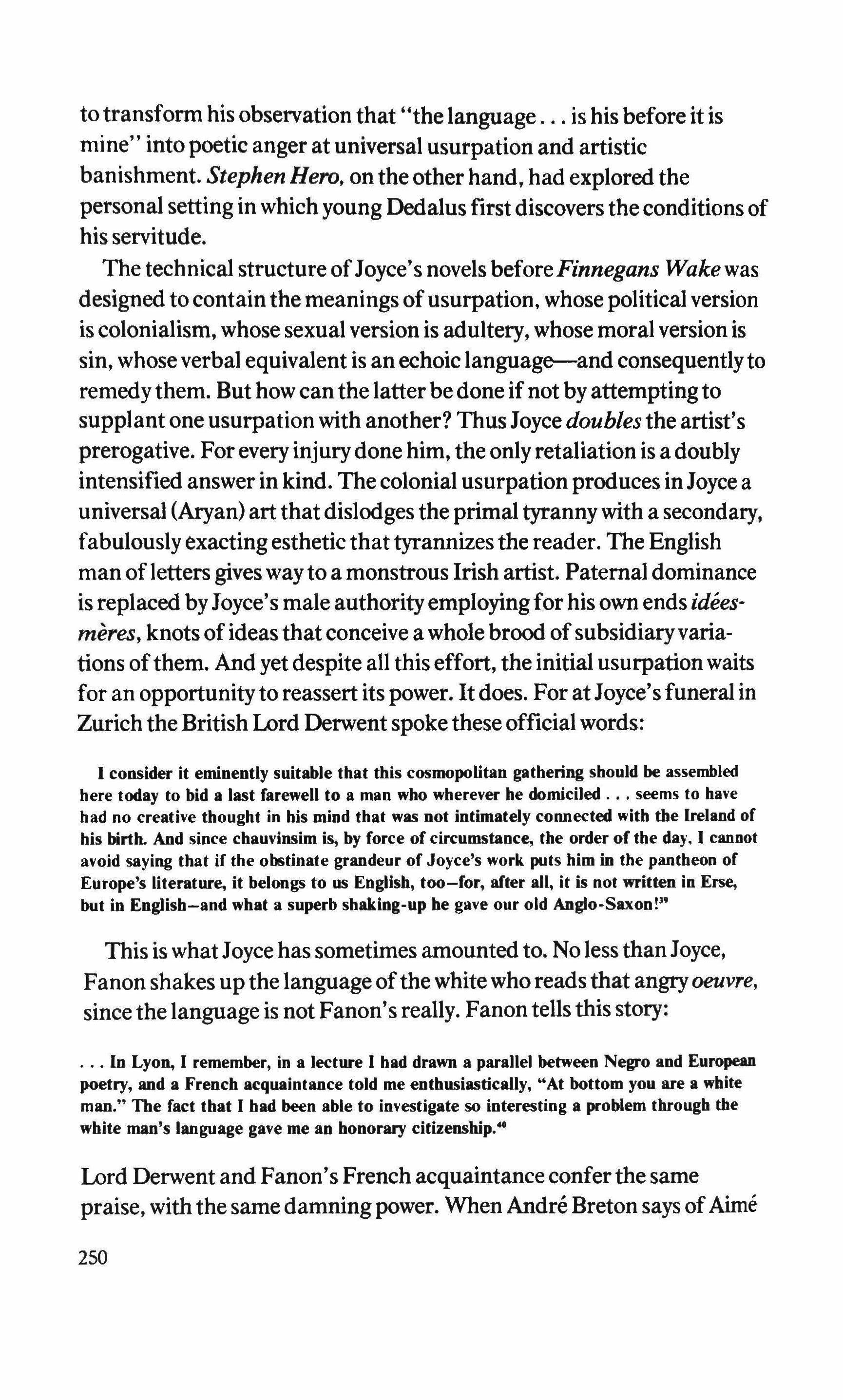
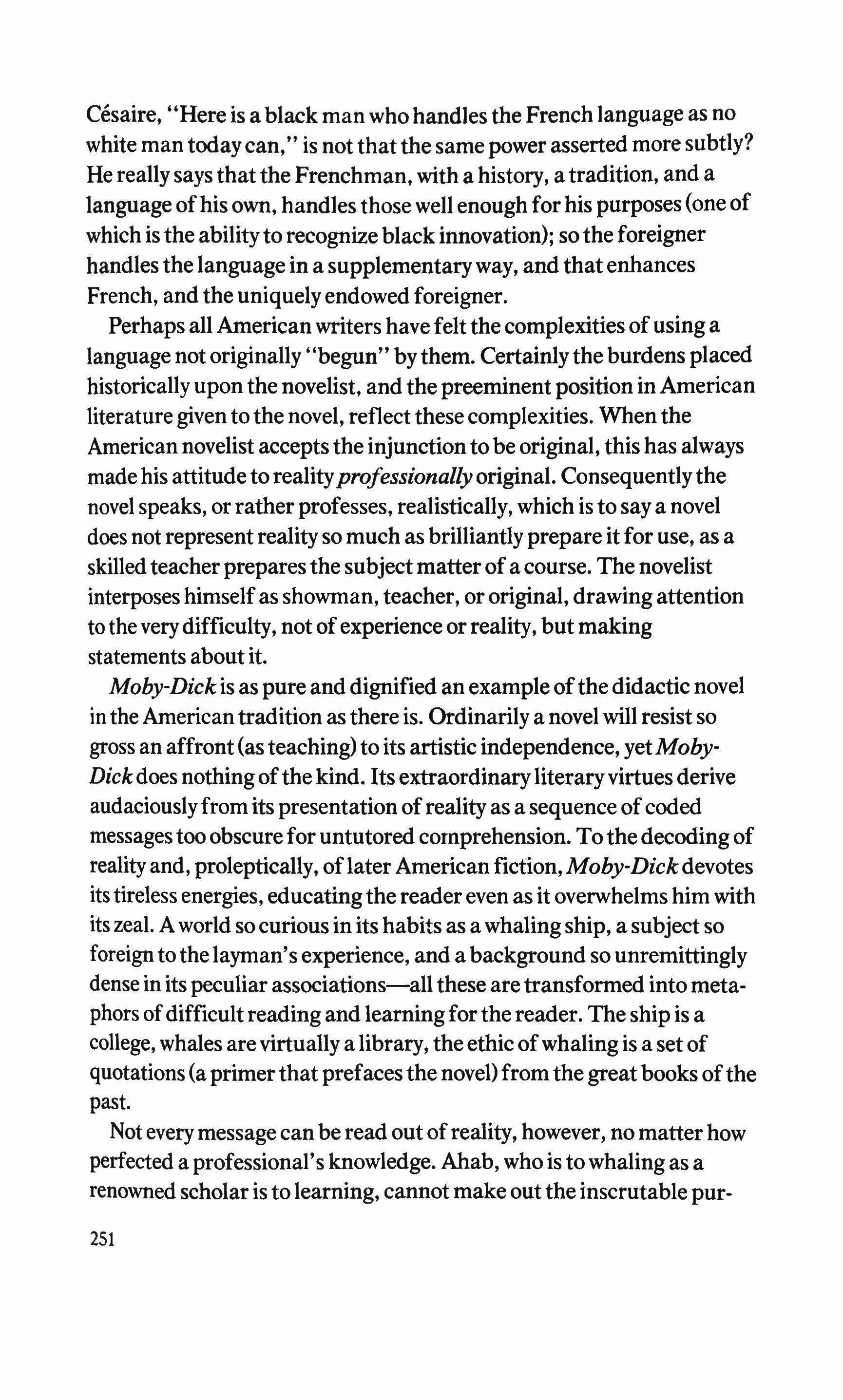
Cesaire, "Here is a black man who handles the French language as no white man todaycan," is not that the same power asserted more subtly? He really says that the Frenchman, with a history, a tradition, and a language ofhis own, handles those well enough for his purposes (one of which is the abilityto recognize black innovation); so the foreigner handles the language in a supplementary way, and that enhances French, and the uniquelyendowed foreigner.
Perhaps all American writers have felt thecomplexities ofusing a language not originally''begun" bythem. Certainlythe burdens placed historically upon the novelist, and the preeminentposition in American literature given to the novel, reflectthese complexities. Whenthe American novelist accepts the injunction to be original, this has always made his attitude to realityprofessionallyoriginal. Consequentlythe novel speaks, or rather professes, realistically, which is to say a novel does not represent reality so much as brilliantly prepare it for use, as a skilledteacher prepares the subject matter of a course. The novelist interposes himself as showman, teacher, or original, drawingattention to the verydifficulty, not ofexperience or reality, but making statements about it.
Moby-Dickis as pure and dignified an example ofthe didactic novel in the American tradition as there is. Ordinarily a novel will resist so gross an affront(asteaching) to its artistic independence, yetMobyDickdoes nothing ofthe kind. Its extraordinaryliteraryvirtues derive audaciouslyfrom its presentation ofreality as a sequence ofcoded messagestoo obscure for untutored comprehension. Tothedecoding of realityand, proleptically, oflater American fiction, Moby-Dickdevotes itstireless energies, educatingthe reader even as it overwhelms him with its zeal. Aworld so curious in its habits as a whalingship, a subject so foreign to thelayman'sexperience, and a background so unremittingly dense in its peculiar associations-all these are transformed into metaphors ofdifficult reading and learningforthe reader. The ship is a college, whales are virtually a library, theethic ofwhaling is a set of quotations(aprimerthat prefacesthe novel)fromthe great books ofthe past.
Not every message can be read out ofreality, however, no matter how perfected a professional'sknowledge. Ahab, who is to whaling as a renowned scholaris to learning, cannot make outthe inscrutable pur-
251
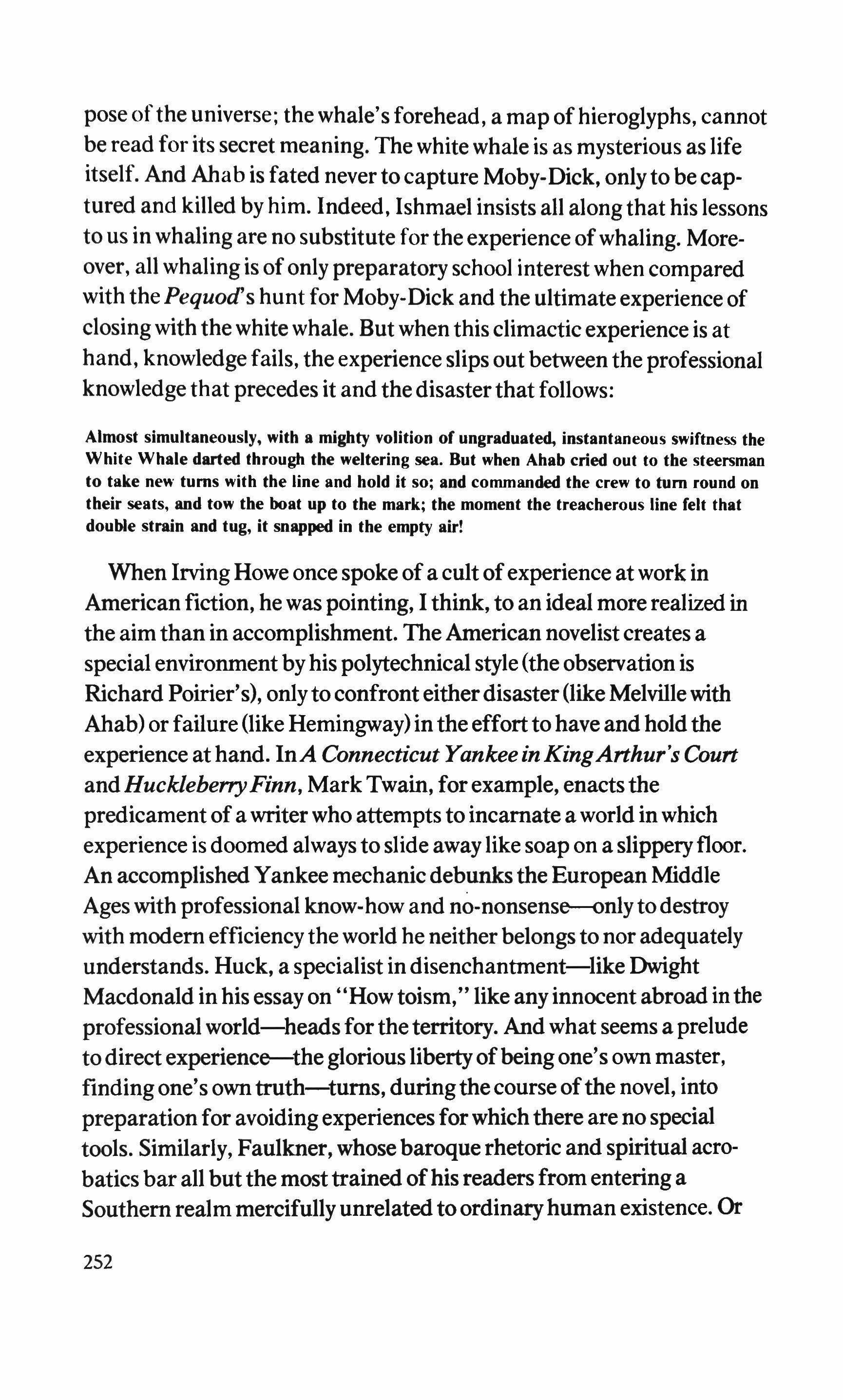
pose ofthe universe; the whale's forehead, a map ofhieroglyphs, cannot be read for its secret meaning. The white whale is as mysterious as life itself. And Ahab is fated never to capture Moby-Dick, only to be captured and killed by him. Indeed, Ishmael insists all along that his lessons to us in whaling are no substitute for the experience ofwhaling. Moreover, all whaling is ofonly preparatory school interest when compared with the Pequod's hunt for Moby-Dick and the ultimate experience of closingwith the white whale. But when this climactic experience is at hand, knowledgefails, the experienceslips out between the professional knowledge that precedes it and the disasterthat follows:
Almost simultaneously, with a mighty volition of ungraduated, instantaneous swiftness the White Whale darted through the weltering sea. But when Ahab cried out to the steersman to take new turns with the line and hold it so; and commanded the crew to tum round on their seats, and tow the boat up to the mark; the moment the treacherous line felt that double strain and tug, it snapped in the empty air!
When Irving Howe once spoke of a cult ofexperience at work in American fiction, he was pointing, I think, to an ideal more realized in the aim than in accomplishment. The American novelist creates a special environment byhis polytechnical style(the observation is Richard Poirier's), onlyto confront eitherdisaster(like Melvillewith Ahab) or failure (like Hemingway) inthe effort to have and hold the experience at hand. InA Connecticut Yankee in KingArthur's Court and HuckleberryFinn, Mark Twain, for example, enacts the predicament of a writer who attempts to incarnate a world inwhich experience is doomed always to slide away like soap on a slipperyfloor. An accomplished Yankee mechanic debunks the European Middle Ages with professional know-how and no-nonsense=only to destroy with modem efficiencythe world he neither belongs to nor adequately understands. Huck, a specialist in disenchantment-like Dwight Macdonald in his essay on "How toism," like any innocent abroad inthe professional world-heads for theterritory. And what seems a prelude to direct experience-thegloriouslibertyofbeingone's own master, findingone's own truth-turns, duringthe course ofthe novel, into preparation for avoidingexperiences forwhichthere are no special tools. Similarly, Faulkner, whose baroque rhetoric and spiritual acrobatics bar all but the most trained ofhis readers from entering a Southern realm mercifully unrelated to ordinaryhuman existence. Or
252
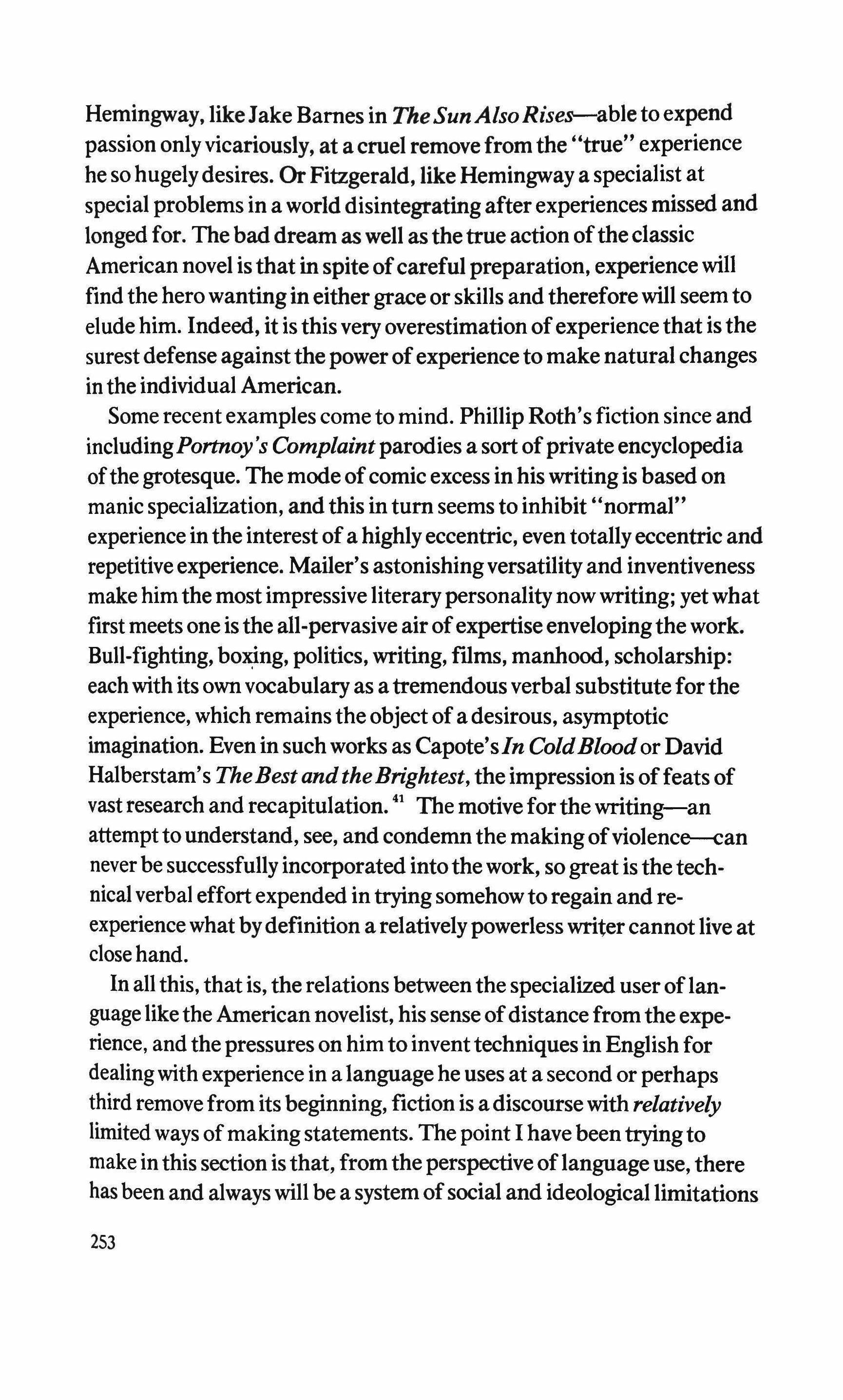
Hemingway, likeJake Barnes in TheSunAlsoRise.t--able to expend passiononlyvicariously, at a cruel remove from the "true" experience he so hugelydesires. Or Fitzgerald, like Hemingway a specialist at special problems in a world disintegrating after experiences missed and longed for. The bad dream as well as the true action oftheclassic American novel isthat in spite ofcareful preparation, experience will find the herowantingineither grace or skills and therefore will seem to elude him. Indeed, it is this very overestimation ofexperience that is the surest defense againstthepower ofexperience to make natural changes in the individual American.
Some recent examples come to mind. Phillip Roth's fiction since and includingPortnoy's Complaintparodies a sort ofprivateencyclopedia ofthe grotesque. The mode ofcomic excess in hiswritingis based on manic specialization, and this in turn seems to inhibit "normal" experience inthe interest of a highlyeccentric, even totallyeccentric and repetitiveexperience. Mailer's astonishingversatilityand inventiveness make him the most impressiveliterarypersonality now writing; yetwhat first meets one isthe all-pervasive airofexpertiseenvelopingthe work. Bull-fighting,boxing, politics,writing, ftlms, manhood, scholarship: eachwith its own vocabulary as a tremendous verbal substituteforthe experience, which remains the object of a desirous, asymptotic imagination. Even in such works as Capote'sIn ColdBlood or David Halberstam's TheBest andtheBrightest, the impression is offeats of vast research and recapitulation. 41 The motive forthe writing-an attempt to understand, see, and condemn the makingofviolence=-can never be successfullyincorporated intothework, so great is thetechnical verbal effort expended in trying somehow to regain and reexperiencewhat bydefinition a relativelypowerlesswriter cannot live at close hand.
In allthis, thatis, the relations betweenthe specialized user oflanguage like the American novelist, his sense ofdistance from the experience, and the pressures on him to inventtechniques in English for dealingwith experience in a language he uses at a second or perhaps third remove from its beginning, fiction is a discourse with relatively limited ways ofmaking statements. The point I have been tryingto make in this section isthat, from the perspectiveoflanguage use, there hasbeen and always will be a system ofsocial and ideological limitations
253
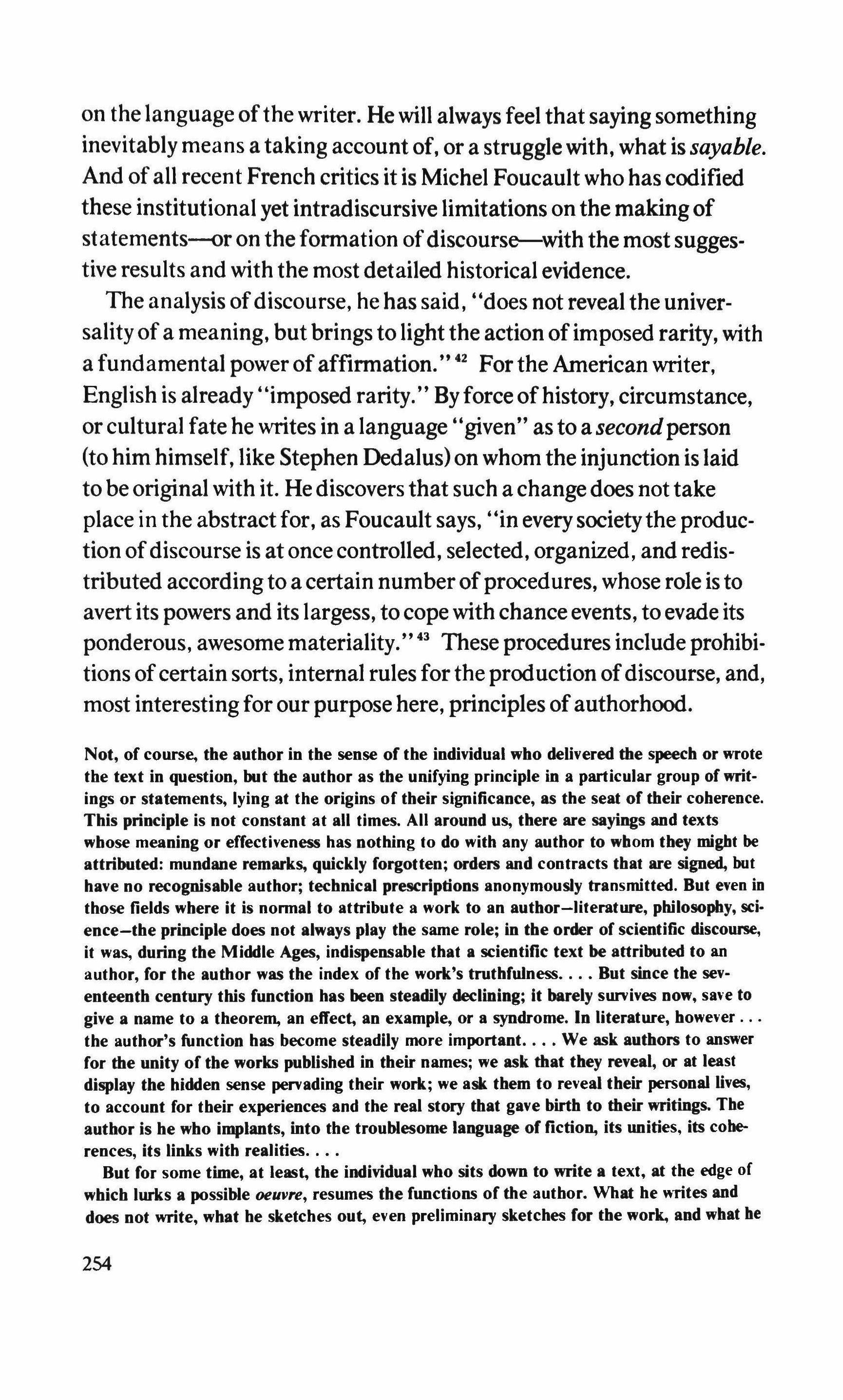
on the language ofthe writer. He will always feel that sayingsomething inevitably means a taking account of, or a strugglewith, what is sayable. And ofall recent French critics it is Michel Foucault who has codified these institutional yet intradiscursive limitations on the makingof statements-or on the formation ofdiscourse-with the most suggestive results and with the most detailed historical evidence.
The analysis ofdiscourse, he has said, "does not reveal the universality of a meaning, but brings to light the action ofimposed rarity, with a fundamental power ofaffirmation." 42 For the American writer, English is already''imposed rarity. Byforce ofhistory, circumstance, or cultural fate he writes in a language "given" as to a secondperson (to him himself, like Stephen Dedalus) on whom the injunction is laid to be original with it. He discovers that such a change does not take place in the abstract for, as Foucault says, "in every societythe production ofdiscourse is at once controlled, selected, organized, and redistributed according to a certain number ofprocedures, whose role is to avert its powers and its largess, to cope with chance events, to evade its ponderous, awesome materiality."
43 These procedures include prohibitions ofcertain sorts, internal rules for the production ofdiscourse, and, most interesting for our purpose here, principles ofauthorhood.
Not, of course, tbe autbor in the sense of the individual wbo delivered the speecb or wrote the text in question, but the autbor as tbe unifying principle in a particular group of writings or statements, lying at the origins of tbeir significance, as the seat of their coberence. Tbis principle is not constant at all times. All around us, tbere are sayings and texts wbose meaning or effectiveness has nothing to do with any author to wbom tbey might be attributed: mundane remarks, quickly forgotten; orders and contracts that are signed, but bave no recognisable author; tecbnical prescriptions anonymously transmitted. But even in tbose fields wbere it is normal to attribute a work to an autbor-Iiterature, philosopby, selence-tbe principle does not always play tbe same role; in tbe order of scientific discourse, it was, during tbe Middle Ages, indispensable tbat a scientific text be attributed to an author, for the author was the index of the work's trutbfulness But since tbe seventeentb century this function bas been steadily declining; it barely survives now, save to give a name to a tbeorem, an effect, an example, or a syndrome. In literature, however tbe autbor's function bas become steadily more important We ask autbors to answer for the unity of tbe works publisbed in their names; we ask that tbey reveal, or at least display tbe bidden sense pervading their work; we ask tbem to reveal tbeir personal lives, to account for tbeir experiences and tbe real story that gave birth to their writings. Tbe autbor is be wbo implants, into tbe troublesome language of fiction, its unities, its coberences, its links witb realities
But for some time, at least, the individual wbo sits down to write a text, at the edge of wbicb lurks a possible oeuvre, resumes tbe functions of the autbor. What he writes and does not write, what be sketches out, even preliminary sketcbes for tbe work, and wbat be
254
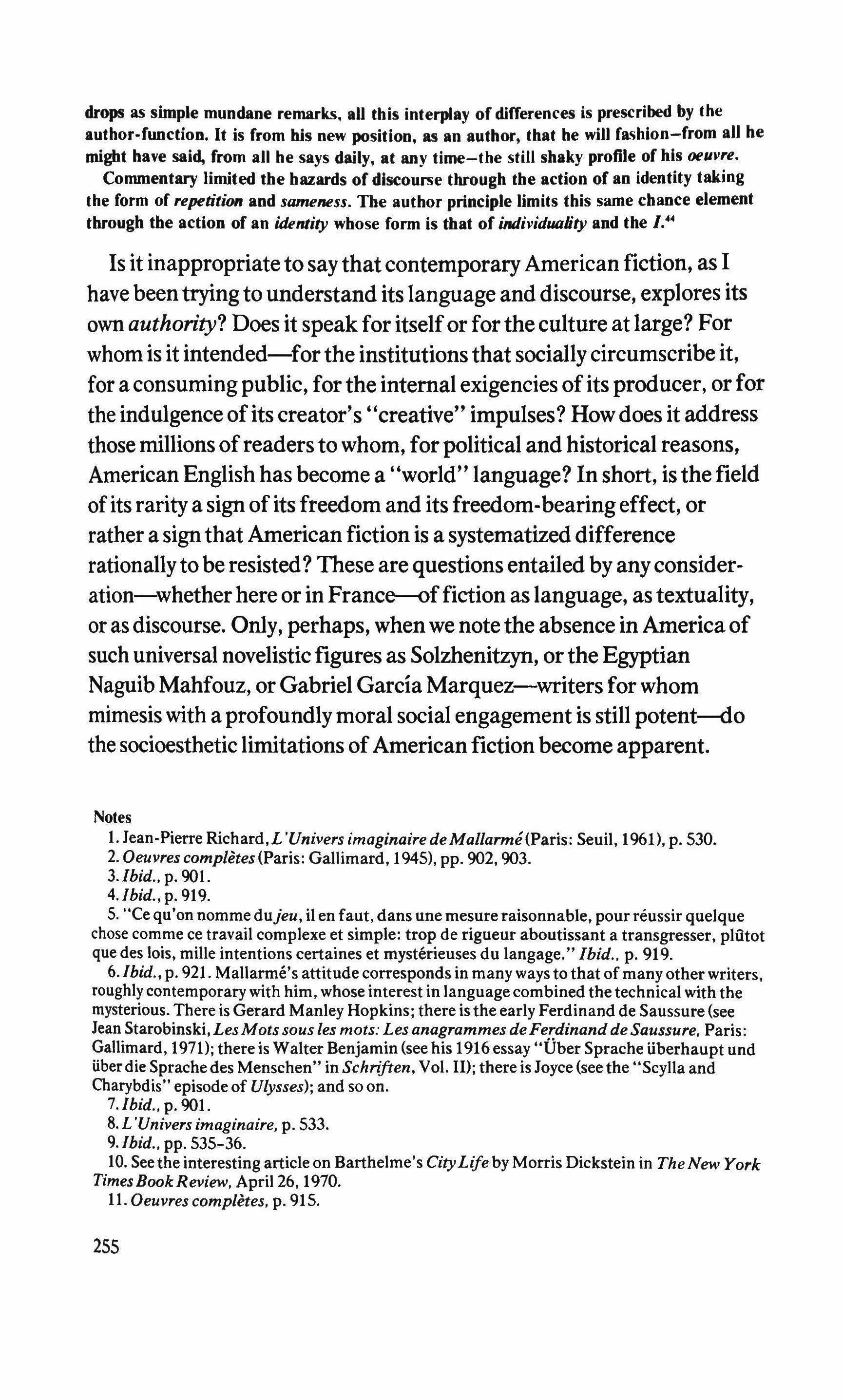
drops as simple mundane remarks. all tbis interplay of differences is prescribed by the author-function. It is from bls new position, as an autbor, tbat he will fashion-from all he might have said, from all he says daily, at any time-the still sbaky profile of his oeuvre. Commentary limited tbe bazards of discourse througb tbe action of an identity taking the form of repetition and sameness. The autbor principle limits tbis same cbance element througb the action of an identity wbose form is that of individuolity and tbe I."
Is it inappropriate to saythatcontemporaryAmerican fiction, as I have been tryingto understand its language and discourse, explores its own authority? Does it speak for itself or forthe culture at large? For whom is it intended-forthe institutions that socially circumscribe it, for a consumingpublic, forthe internal exigencies ofits producer, or for the indulgence ofits creator's "creative" impulses? How does it address those millions ofreaders to whom, forpolitical and historical reasons, American English has become a "world" language? In short, is the field ofits rarity a sign ofits freedom and its freedom-bearingeffect, or rather a signthat American fiction is a systematized difference rationallyto be resisted? These are questions entailed by any consideration-whether here or in France=offiction as language, as textuality, or as discourse. Only, perhaps, when we note the absence in America of such universal novelistic figures as Solzhenitzyn, or the Egyptian Naguib Mahfouz, or Gabriel Garcia Marquez-writers for whom mimesis with a profoundlymoral social engagement is still potent--do the socioesthetic limitations ofAmerican fiction become apparent.
Notes
1. Jean-Pierre Richard,L 'Univers imaginaire deMallarmeii'esis: Seuil, 1961), p. 530.
2. Oeuvres completes (Paris: Gallimard, 1945), pp. 902, 903.
3. Ibid p. 901.
4. Ibid., p. 919.
5. "Ce qu'on nomme dujeu, il en faut, dans une mesure raisonnable, pour reussir quelque chose comme ce travail complexe et simple: trop de rigueur aboutissant a transgresser, plfltot que des lois, mille intentions certaines et mysterieuses du langage." Ibid p. 919.
6. Ibid., p. 921. Mallarme's attitude corresponds in many ways to that of many other writers, roughly contemporary with him. whose interest in language combined the technical with the mysterious. There is Gerard Manley Hopkins; there is the early Ferdinand de Saussure (see Jean Starobinski.ZesMots sous les mots: Les anagrammes deFerdinanddeSaussure, Paris: Gallimard, 1971); there is Walter Benjamin (see his 1916 essay "Uber Sprache iiberhaupt und tiberdie Sprachedes Menschen" in Schriften, Vol. 11); there is Joyce (see the "Scylla and Charybdis" episode of Ulysses); and so on.
7. Ibid., p. 901.
8. L 'Univers imaginaire, p. 533.
9. Ibid pp. 535-36.
10. See the interesting article on Barthelme's CityLifeby Morris Dickstein in The New York Times Book Review. April 26. 1970.
11. Oeuvres completes. p. 915.
255
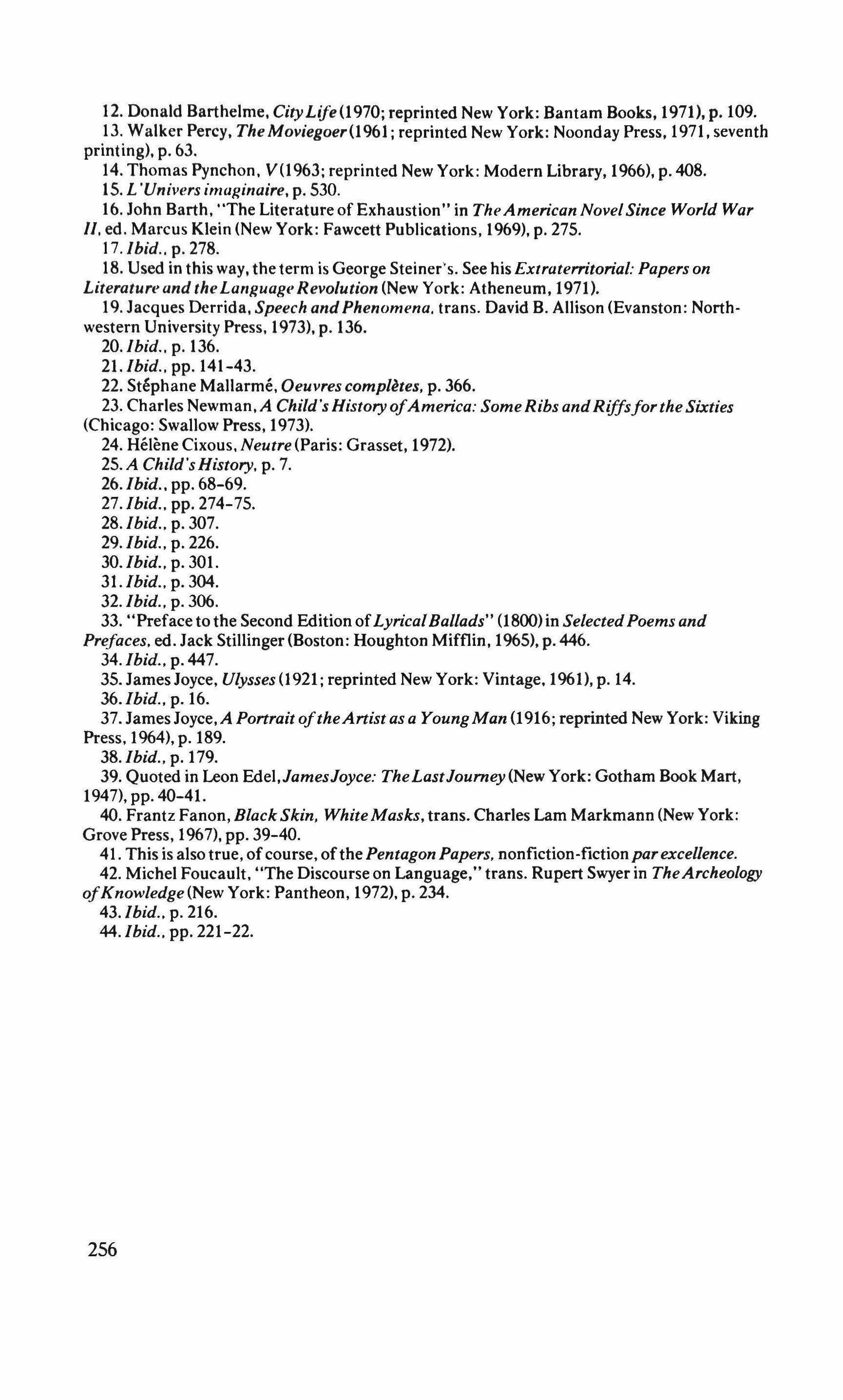
12. Donald Barthelme, CityLife(1970: reprinted New York: Bantam Books, 1971), p. 109.
13. Walker Percy, TheMoviegoer(1961: reprinted New York: Noonday Press, 1971, seventh printing), p. 63.
14. Thomas Pynchon, V(1963; reprinted New York: Modern Library, 1966), p. 408. IS. L 'Univers imuginaire, p. 530.
16. John Barth, "The Literature of Exhaustion" in TheAmerican NovelSince World War II, ed. Marcus Klein (New York: Fawcett Publications, 1969), p. 275.
17. Ibid p. 278.
18. Used in this way, the term is George Steiner's. See his Extraterritorial: Papers on Literature and theLanguageRevolution (New York: Atheneum. 1971).
19. Jacques Derrida, Speech andPhenomena, trans. David B. Allison (Evanston: Northwestern University Press, 1973), p. 136.
20. Ibid p. 136.
21. Ibid., pp. 141-43.
22. Stephane Mallarrne, Oeuvres completes, p. 366.
23. Charles Newman, A Child's HistoryofAmerica: SomeRibs andRiffsforthe Sixties (Chicago: Swallow Press. 1973).
24. Helene Cixous, Neutre (Paris: Grasset, 1972).
25.A Child'sHistory, p. 7.
26. Ibid pp. 68-69.
27. Ibid pp. 274-75.
28. Ibid., p. 307.
29. Ibid., p. 226.
30. Ibid., p. 301.
31.lbid., p. 304.
32. Ibid., p. 306.
33. "Preface to the Second Edition ofLyricalBallads" (1800)in SelectedPoems and Prefaces, ed. Jack Stillinger (Boston: Houghton Mifflin, 1965), p. 446.
34. Ibid., p. 447.
35. James Joyce, Ulysses (1921; reprinted New York: Vintage, 1961). p. 14.
36. Ibid., p. 16.
37. James Joyce, A Portrait oftheArtist as a YoungMan (1916: reprinted New York: Viking Press, 1964),p. 189.
38. Ibid., p.179.
39. Quoted in Leon Ede1,JamesJoyce: TheLastJoumey(New York: Gotham Book Mart. 1947), pp. 40-41.
40. Frantz Fanon, BlackSkin, WhiteMasks, trans. Charles Lam Markmann (New York: Grove Press, 1967), pp. 39-40.
41. This is also true, of course, ofthe PentagonPapers. nonfiction-fiction parexcellence.
42. Michel Foucault, "The Discourse on Language," trans. Rupert Swyer in TheArcheology ofKnowledge (New York: Pantheon, 1972), p. 234.
43. Ibid p. 216.
44. Ibid pp. 221-22.
256
Fiction hot and kool: dilemmas ofthe experimental writer
Morris Dickstein
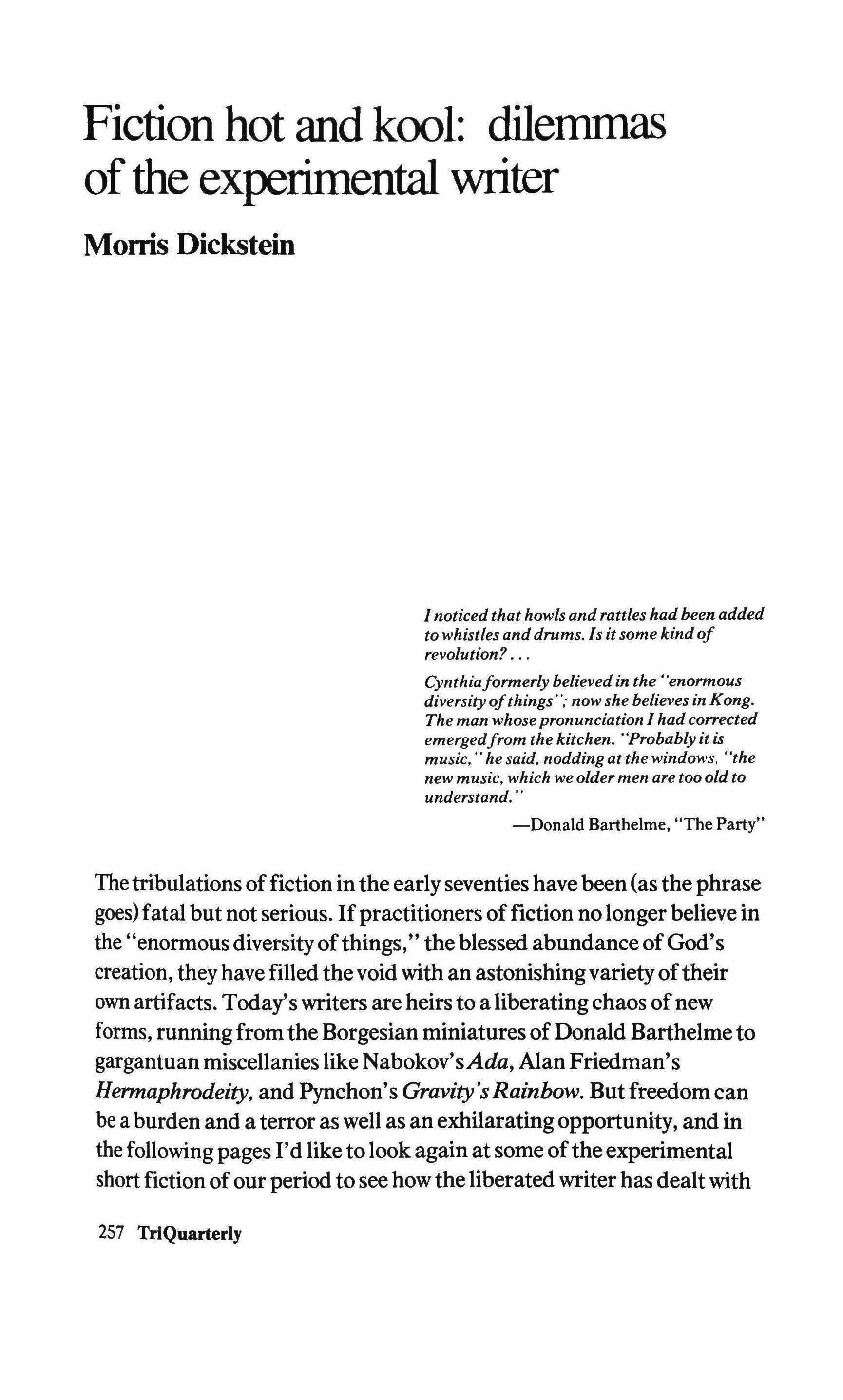
I noticed that howls and rattles had been added to whistles and drums. Is it some kind of revolution?
Cynthiaformerly believed in the "enormous diversity ofthings "; now she believes in Kong. The man whosepronunciation I hadcorrected emergedfrom the kitchen. "Probably it is music. he said. nodding at the windows. "the new music. which we older men are too old to understand
-Donald Barthelme, "The Party"
Thetribulations offiction inthe early seventies havebeen(as the phrase goes)fatal but not serious. Ifpractitioners offiction no longerbelieve in the "enormous diversityofthings," the blessed abundance ofGod's creation, they have filled thevoid with an astonishingvarietyoftheir own artifacts. Today's writers are heirs to a liberating chaos of new forms, runningfromthe Borgesian miniatures of Donald Barthelmeto gargantuan miscellanies like Nabokov'sAda, Alan Friedman's Hermaphrodeity, and Pynchon's Gravity'sRainbow. But freedom can be a burden and a terror as well as an exhilaratingopportunity, and in the following pages I'd like to look again at some oftheexperimental short fiction of our period to see howtheliberated writer has dealt with 257 TriQuarterly
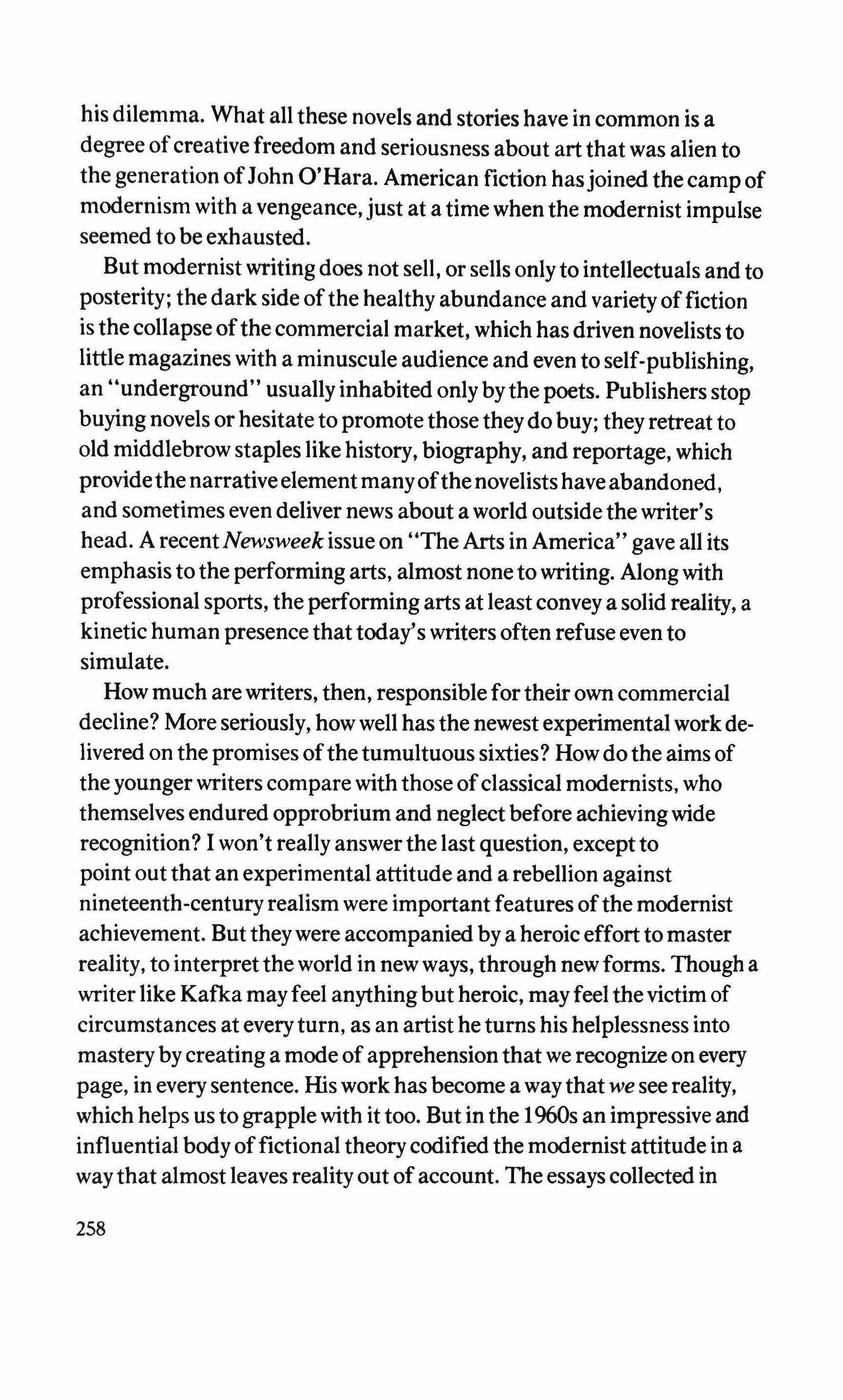
his dilemma. What all these novels and stories have in common is a degree ofcreative freedom and seriousness about art that was alien to the generation ofJohn O'Hara. American fiction hasjoined the camp of modernism with a vengeance, just at a time when the modernist impulse seemed to be exhausted.
But modernist writing does not sell, or sells only to intellectuals and to posterity; the dark side ofthe healthy abundance and variety offiction is the collapse ofthe commercial market, which has driven novelists to little magazines with a minuscule audience and even to self-publishing, an "underground" usually inhabited onlybythe poets. Publishers stop buying novels or hesitate to promote those theydo buy; they retreat to old middlebrow staples like history, biography, and reportage, which providethenarrativeelement manyofthenovelists haveabandoned, and sometimes even deliver news about a world outside the writer's head. A recentNewsweek issue on "The Arts in America" gave all its emphasis to the performing arts, almost none to writing. Alongwith professional sports, the performing arts at least convey a solid reality, a kinetic human presence thattoday's writers often refuse even to simulate.
How much are writers, then, responsible for their own commercial decline? More seriously, how well has the newest experimental work delivered on the promises ofthe tumultuous sixties? How do the aims of the younger writers compare with those ofclassical modernists. who themselves endured opprobrium and neglect before achievingwide recognition? I won't really answer the last question, except to point out that an experimental attitude and a rebellion against nineteenth-century realism were important features ofthe modernist achievement. But they were accompaniedby a heroic effort to master reality, to interpretthe world in new ways, through new forms. Though a writer like Kafka mayfeel anythingbut heroic, mayfeel thevictim of circumstances at every turn, as an artist he turns his helplessness into masterybycreating a mode of apprehension that we recognize on every page, in every sentence. His work has become a way that we see reality, which helps us to grapple with it too. But in the 1960s an impressive and influential body offictional theorycodified the modernist attitude in a way that almost leaves reality out of account. The essays collected in
258
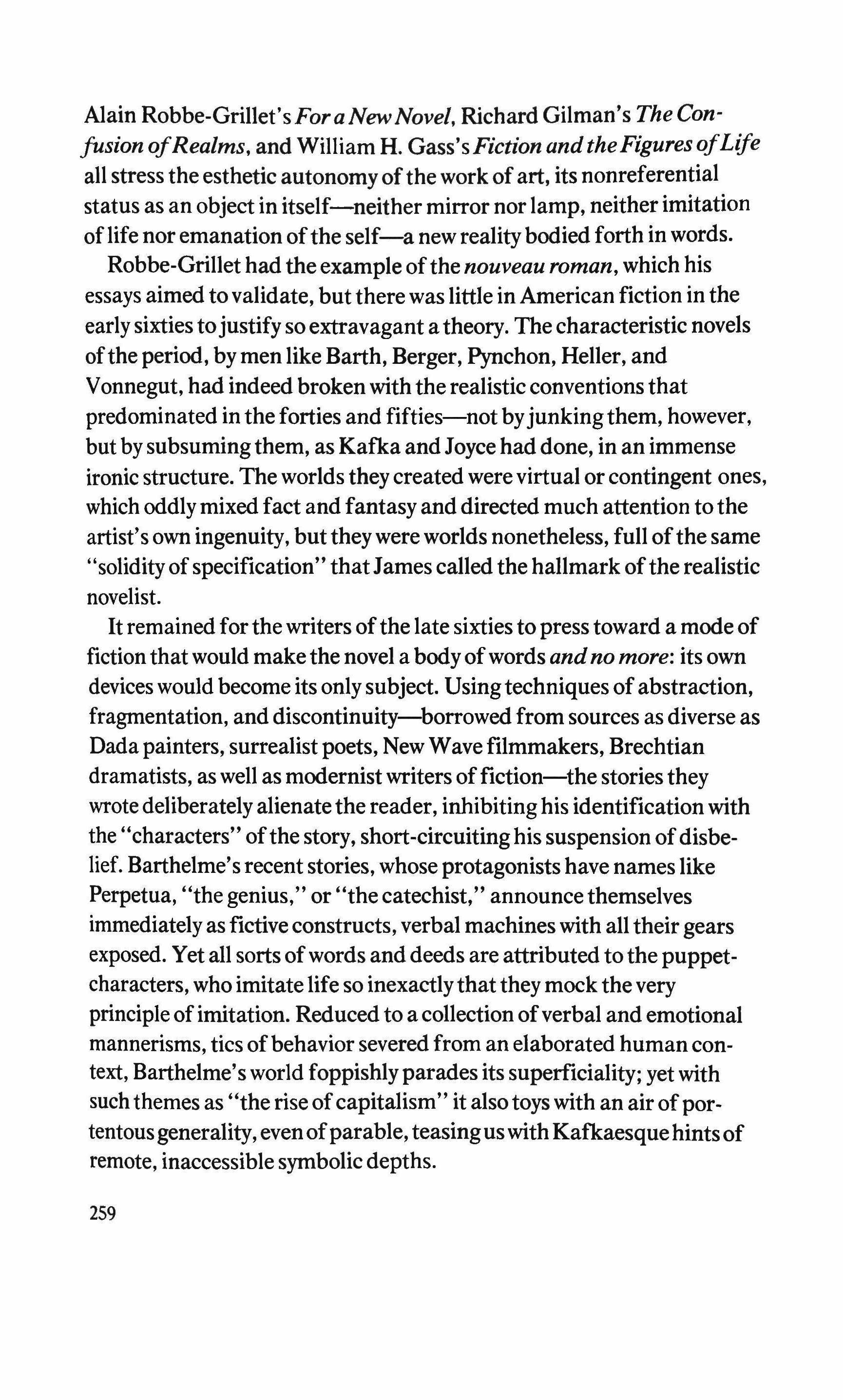
Alain Robbe-Grillet's For a NewNovel. Richard Gilman's The Confusion ofRealms. and William H. Gass'sFiction andtheFiguresofLife all stress the esthetic autonomy ofthe work of art, its nonreferential status as an object in itself-neither mirror nor lamp, neither imitation oflife nor emanation ofthe self-a new reality bodied forth in words. Robbe-Grillet had the example ofthe nouveau roman, which his essays aimed to validate, but there was little in American fiction in the earlysixties tojustify so extravagant a theory. The characteristic novels ofthe period, by men like Barth, Berger, Pynchon, Heller, and Vonnegut, had indeed broken with the realistic conventions that predominated in the forties and fifties-not byjunkingthem, however, but bysubsumingthem, as Kafka and Joyce had done, in an immense ironic structure. The worlds they created were virtual or contingent ones, which oddlymixed fact and fantasy and directed much attention to the artist's own ingenuity, butthey were worlds nonetheless, full ofthe same "solidity ofspecification" thatJames called the hallmark ofthe realistic novelist.
It remained forthewriters ofthe late sixties to press toward a mode of fictionthat would make the novel a bodyofwords and no more: its own devices would become its onlySUbject. Usingtechniques ofabstraction, fragmentation, and discontinuity-borrowedfrom sources as diverse as Dada painters, surrealist poets, New Wave filmmakers, Brechtian dramatists, as well as modernist writers offiction-the stories they wrote deliberately alienate the reader, inhibiting his identification with the "characters" ofthe story, short-circuiting his suspension ofdisbelief. Barthelme's recent stories, whose protagonists have names like Perpetua, "the genius," or "the catechist," announce themselves immediately as fictiveconstructs, verbal machines with all their gears exposed. Yet all sorts ofwords and deeds are attributed to the puppetcharacters, who imitatelife so inexactlythat theymock the very principle ofimitation. Reduced to a collection ofverbal and emotional mannerisms, tics ofbehavior severed from an elaborated human context, Barthelme's world foppishlyparades its superficiality; yet with suchthemes as "the rise ofcapitalism" it alsotoys with an air ofportentousgenerality, even ofparable,teasing us with Kafkaesquehintsof remote, inaccessible symbolicdepths. 259
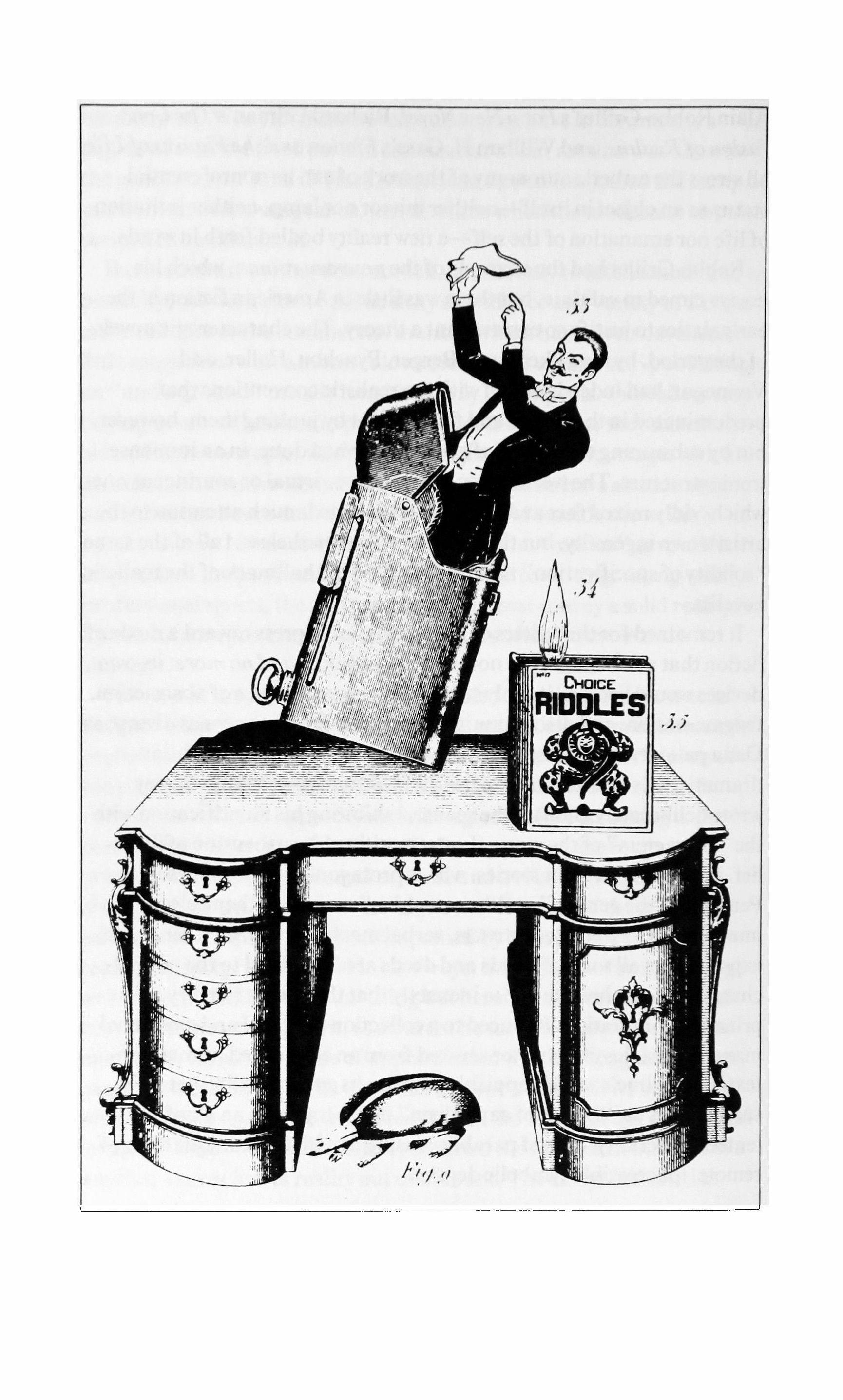
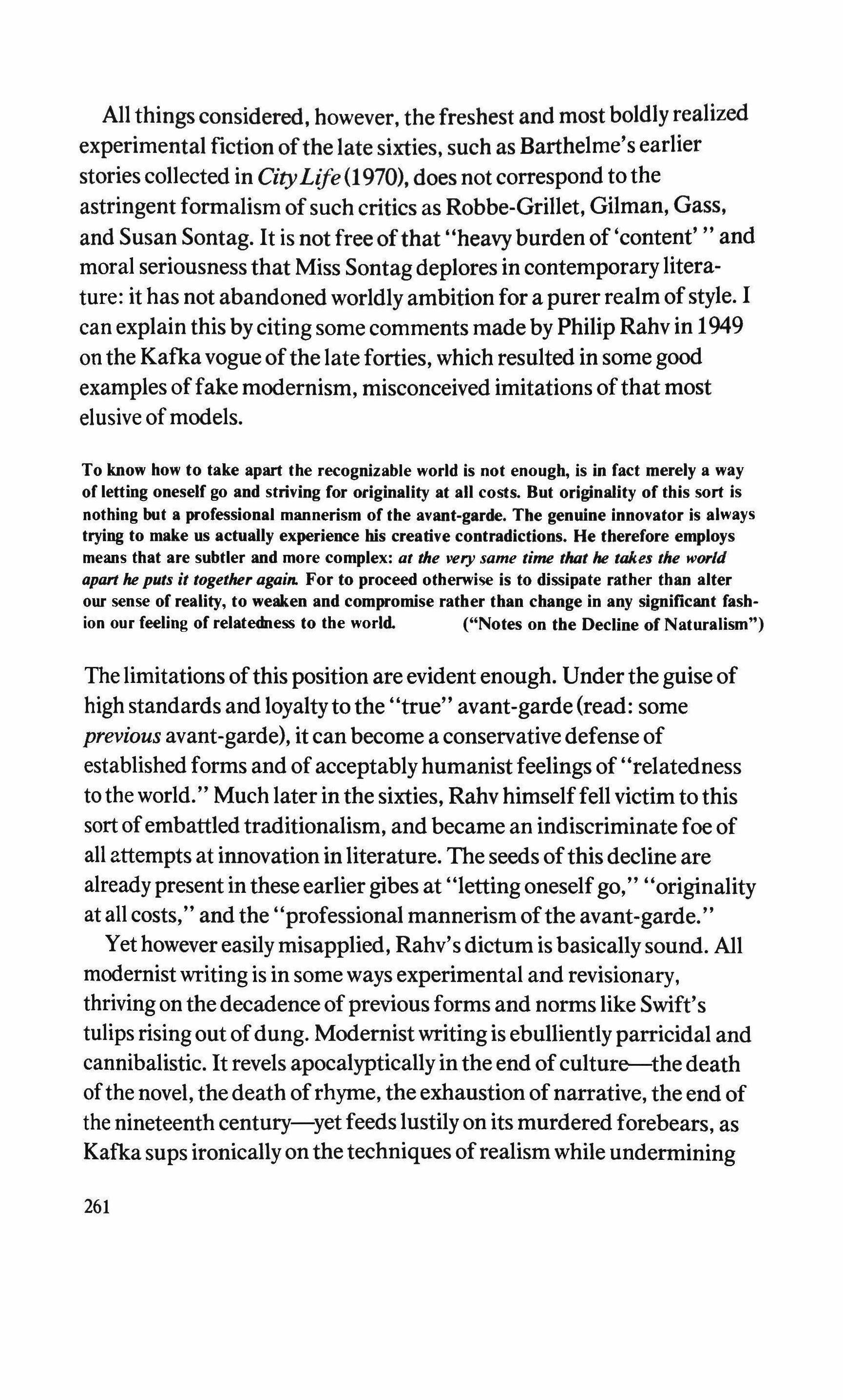
All thingsconsidered, however, the freshest and most boldly realized experimental fiction ofthe late sixties, such as Barthelme's earlier stories collected in CityLife(1970), does not correspond to the astringent formalism of such critics as Robbe-Grillet, Gilman, Gass, and Susan Sontag. It is not free ofthat "heavy burden of 'content' and moral seriousness that Miss Sontagdeplores in contemporary literature: it has not abandoned worldly ambition for a purer realm ofstyle. I can explain this byciting some comments made byPhilip Rahv in 1949 on the Kafka vogue ofthe late forties, which resulted in some good examples offake modernism, misconceived imitations ofthat most elusive ofmodels.
To know how to take apart the recognizable world is not enough, is in fact merely a way of letting oneself go and striving for originality at all costs. But originality of this sort is nothing but a professional mannerism of the avant-garde. The genuine innovator is always trying to make us actually experience his creative contradictions. He therefore employs means that are subtler and more complex: at the very same time that he takes the world apart he puts it together again. For to proceed otherwise is to dissipate rather than alter our sense of reality, to weaken and compromise rather than change in any significant fashion our feeling of relatedness to the world. ("Notes on the Decline of Naturalism")
The limitations ofthis position are evident enough. Underthe guise of high standards and loyaltyto the "true" avant-garde(read: some previous avant-garde), it can become a conservative defense of established forms and ofacceptablyhumanist feelings of "relatedness to the world." Much later in the sixties, Rahv himselffell victim to this sort ofembattled traditionalism, and became an indiscriminate foe of all attempts at innovation in literature. The seeds ofthis decline are alreadypresent in theseearlier gibes at "letting oneselfgo," "originality at all costs," and the "professional mannerism ofthe avant-garde."
Yet however easilymisapplied, Rahv's dictum is basically sound. All modernist writing is in some ways experimental and revisionary, thriving on the decadence ofprevious forms and norms like Swift's tulipsrising out ofdung. Modernistwriting is ebullientlyparricidal and cannibalistic. It revels apocalyptically in the end ofculture-the death ofthe novel, thedeath ofrhyme, the exhaustion of narrative, the end of the nineteenth century-yet feeds lustily on its murdered forebears, as Kafka sups ironically on the techniques ofrealismwhile undermining
261

their grip on causality and "reality," as Joyce turns Ulysses into a parodisticanthology oftraditional styles.
But in all the best modernist writingthis negative and parodistic element never predominates, however large it bulks. Some modernist techniques do aim at pure destruction and chaos, a form ofesthetic terrorism, but where this polemical side is dominant we often find publicists rather than artists, Dada rather than symbolism, Dali rather than Picasso. Otherwise, where modernist or experimental art seems unstructured, incoherent, anarchic, even nihilistic, as is often the case, it usually means that we have not yet recognized the new norm, the new principle ofcoherence or mode of awareness that the artist has invented. Often enough,though, we sense that it is there, for our instinct is sounder than our esthetic, which is still grounded in the idees recues of the past. The function ofcriticism is to interrogate that feeling, to turn into new categories, a new esthetic. Bad criticism spins clevertheories; good criticismjustifies unexpected intuitions.
In the experimental fiction ofthe late sixties, the largelynegative strain shows itself most clearly inJohn Barth's stories inLost in the Funhouse, in Robert Coover'sPricksongs & Descants, in Barthelme's novellaSnow White, inthe insubstantial and self-indulgent anti-world ("Antiterra") ofNabokov'sAda, and inthe catatonic ambience of Rudolph Wurlitzer'sNog andFlats, to name only a fewexamples.
* There is much to praise in all these books: corrosive ironies, flights of fantasy, nuance oflanguage that we expect more from poetry than fiction. What they too frequently lack is poignancy, intensity, a recognizably human framework. I don't mean realism, which is only one of many conventions bywhich art approximates the human. Without beingrepresentational,thepaintingsofKlineand Pollock, withtheir sweeping swathes or dense multiplelayers ofpaint, boldly suggestthe energies oftheircomposition, the turbulent circumstances oftheir own inception. These works are not really "about" themselves, however, becausetheirreflexivenesstakes us through andbeyondtechnique,
* I have discussed most ofthese works in previous articles, including a review ofAda in The New Republic (June 28. 1969), a review-essay on Barthelme in TheNew York Times Book Review (April 26, 1970), and a review of Wurlitzer's Quake, also in the Times Book Review (October 22, 1972).
262
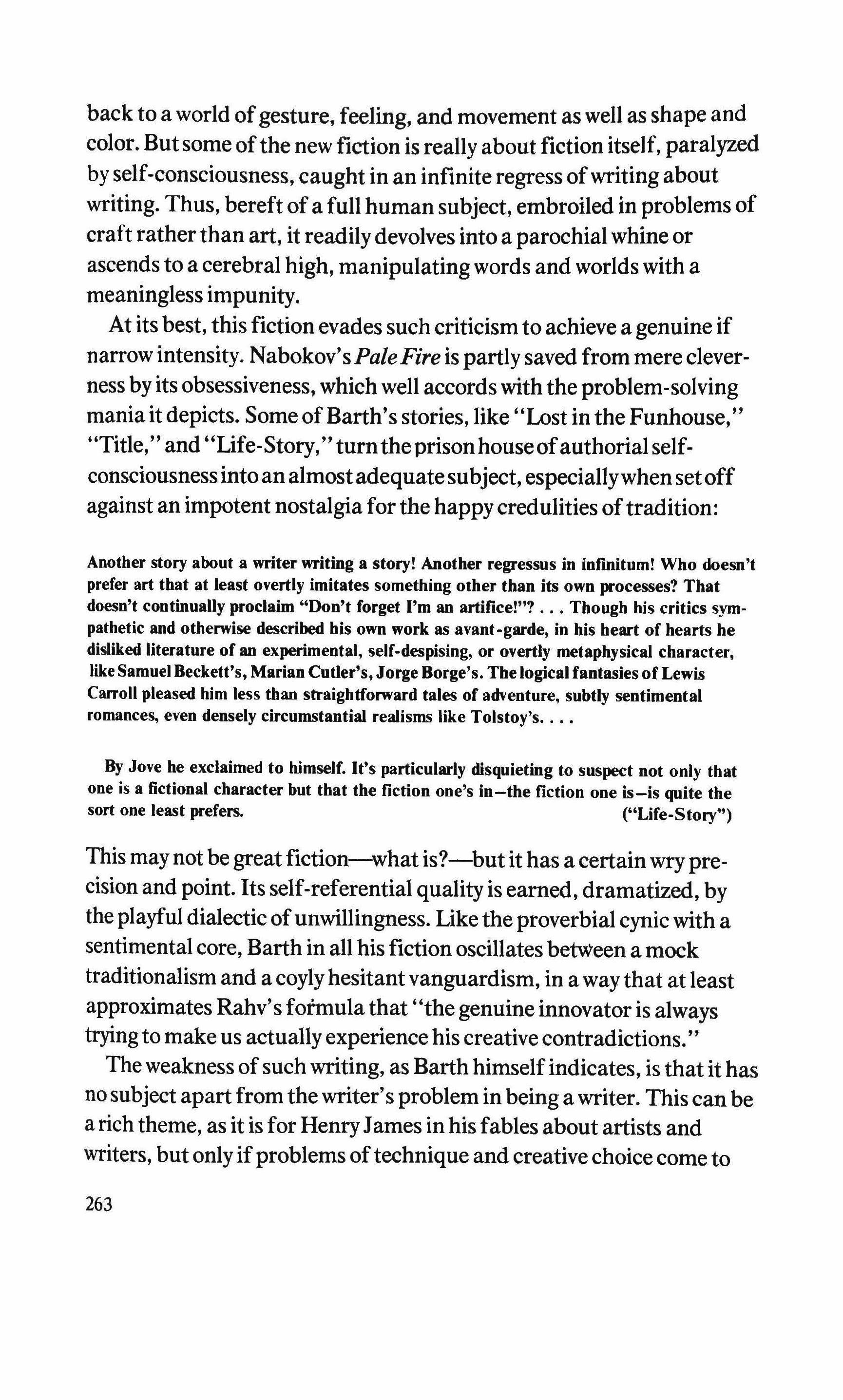
back to a world of gesture, feeling, and movement as well as shape and color. But some ofthe new fiction is really about fiction itself, paralyzed byself-consciousness, caught in an infinite regress ofwriting about writing. Thus, bereft of a full human SUbject, embroiled in problems of craft rather than art, it readily devolves into a parochial whine or ascends to a cerebral high, manipulatingwords and worlds with a meaninglessimpunity.
At its best, this fiction evades such criticism to achieve a genuine if narrow intensity. Nabokov'sPaleFire is partly saved from mere cleverness by its obsessiveness, which well accords with the problem-solving mania it depicts. Some ofBarth's stories, like" Lost inthe Funhouse," "Title," and "Life-Story," turntheprison house ofauthorial selfconsciousnessinto an almostadequatesubject,especiallywhen setoff against an impotentnostalgia forthe happycredulities oftradition:
Another story about a writer writing a story! Another regressus in infmitum! Who doesn't prefer art that at least overtly imitates something other than its own processes? That doesn't continually proclaim "Don't forget I'm an artifice!"? Though his critics sympathetic and otherwise described his own work as avant-garde, in his heart of hearts he disliked literature of an experimental, self-despising, or overtly metaphysical character, like Samuel Beckett's, Marian Cutler's,Jorge Borge's. Tbe logical fantasies of Lewis Carroll pleased him less than straightforward tales of adventure, subtly sentimental romances, even densely circumstantial realisms like Tolstoy'S
By Jove he exclaimed to himself. It's particularly disquieting to suspect not only that one is a fictional character but that the fiction one's in-the fiction one is-is quite the sort one least prefers. ("Life-Story")
This may not be great fiction-what is?-but it has a certain wry precision and point. Its self-referential quality is earned, dramatized, by the playful dialectic of unwillingness. Likethe proverbial cynic with a sentimental core, Barth in all his fiction oscillates between a mock traditionalism and a coylyhesitantvanguardism, in a way that at least approximates Rahv's formulathat "the genuine innovator is always trying to make us actuallyexperience his creative contradictions."
The weakness ofsuch writing, as Barth himselfindicates, is that it has no subject apartfrom the writer's problem in being a writer. This can be a rich theme, as it is for HenryJames in his fables about artists and writers, butonly ifproblems oftechnique and creative choice come to
263
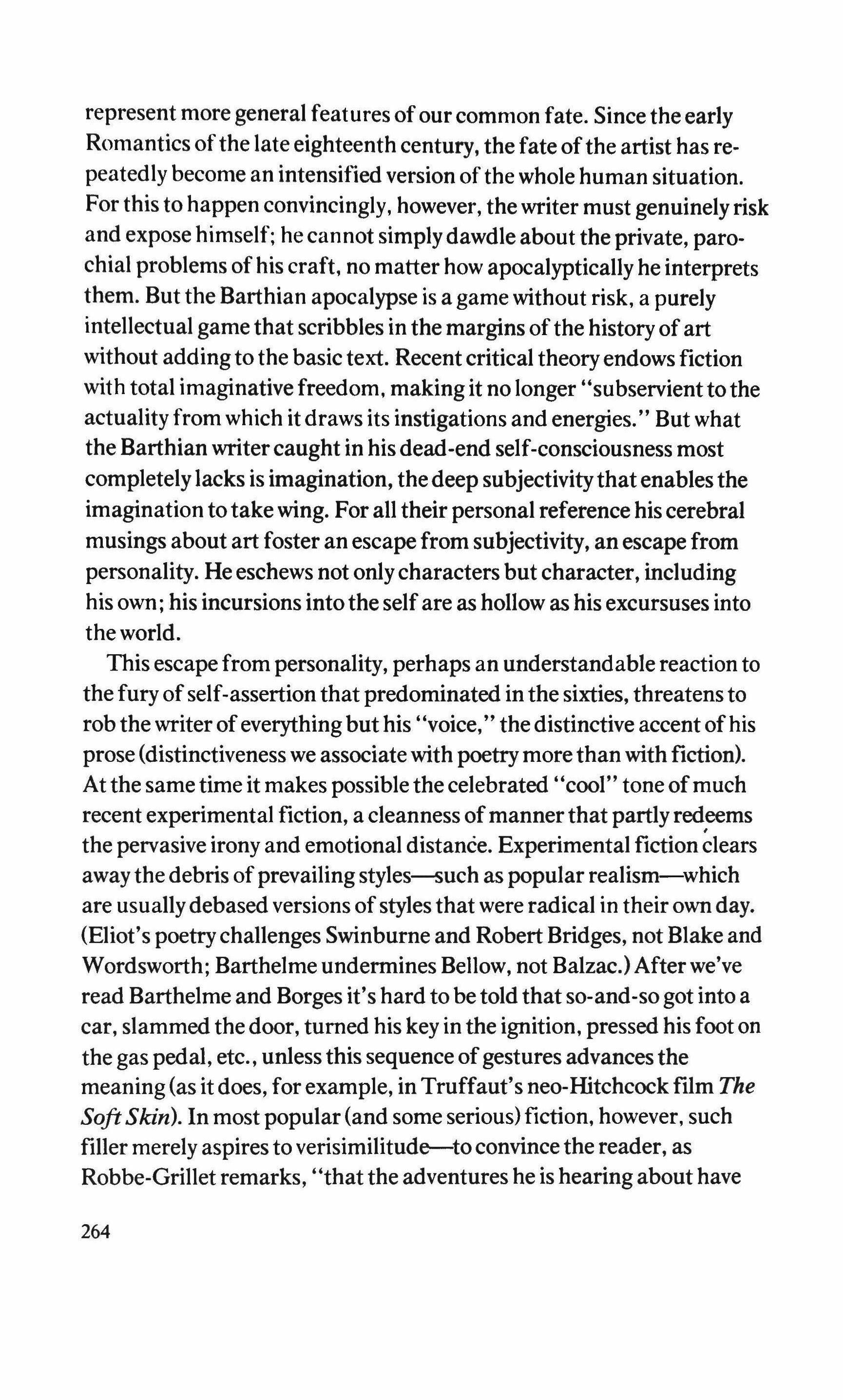
represent more general features of our common fate. Since the early Romantics ofthe late eighteenth century, the fate ofthe artist has repeatedly become an intensified version of the whole human situation. For this to happen convincingly, however, the writer must genuinely risk and expose himself; he cannot simplydawdle about the private, parochial problems ofhis craft, no matter how apocalyptically he interprets them. But the Barthian apocalypse is a game without risk, a purely intellectual game that scribbles in the margins ofthe history of art without adding to the basic text. Recent critical theoryendows fiction with total imaginativefreedom, making it no longer "subservient to the actuality from which it draws its instigations and energies." But what the Barthian writer caught in his dead-end self-consciousness most completelylacks is imagination, thedeepSUbjectivitythatenables the imagination to take wing. For all their personal reference his cerebral musings about art foster an escape from SUbjectivity, an escape from personality. He eschews not onlycharacters but character, including his own; his incursions intothe self are as hollow as his excursuses into the world.
This escape from personality, perhaps an understandable reaction to the fury ofself-assertion that predominated in the sixties, threatens to rob the writer ofeverythingbut his''voice," the distinctive accent ofhis prose (distinctiveness we associate with poetry more than with fiction). At the same time it makes possible the celebrated "cool" tone ofmuch recent experimental fiction, a cleanness of manner that partly redeems the pervasiveirony and emotional distance. Experimental fiction �lears away the debris of prevailingstyles-such as popular realism-which are usuallydebased versions ofstyles that were radical in their own day. (Eliot's poetrychallenges Swinburne and Robert Bridges, not Blake and Wordsworth; Barthelme undermines Bellow, not Balzac.) Afterwe've read Barthelme and Borges it's hard to betold that so-and-so got into a car, slammed the door, turned his key in the ignition, pressed his foot on the gas pedal, etc., unless this sequence ofgestures advances the meaning(as it does, for example, in Truffaut's neo-Hitchcock film The SoftSkin). In most popular(and some serious) fiction, however, such filler merelyaspires to verisimilitude--toconvincethe reader, as Robbe-Grillet remarks, "that the adventures he is hearing about have
264
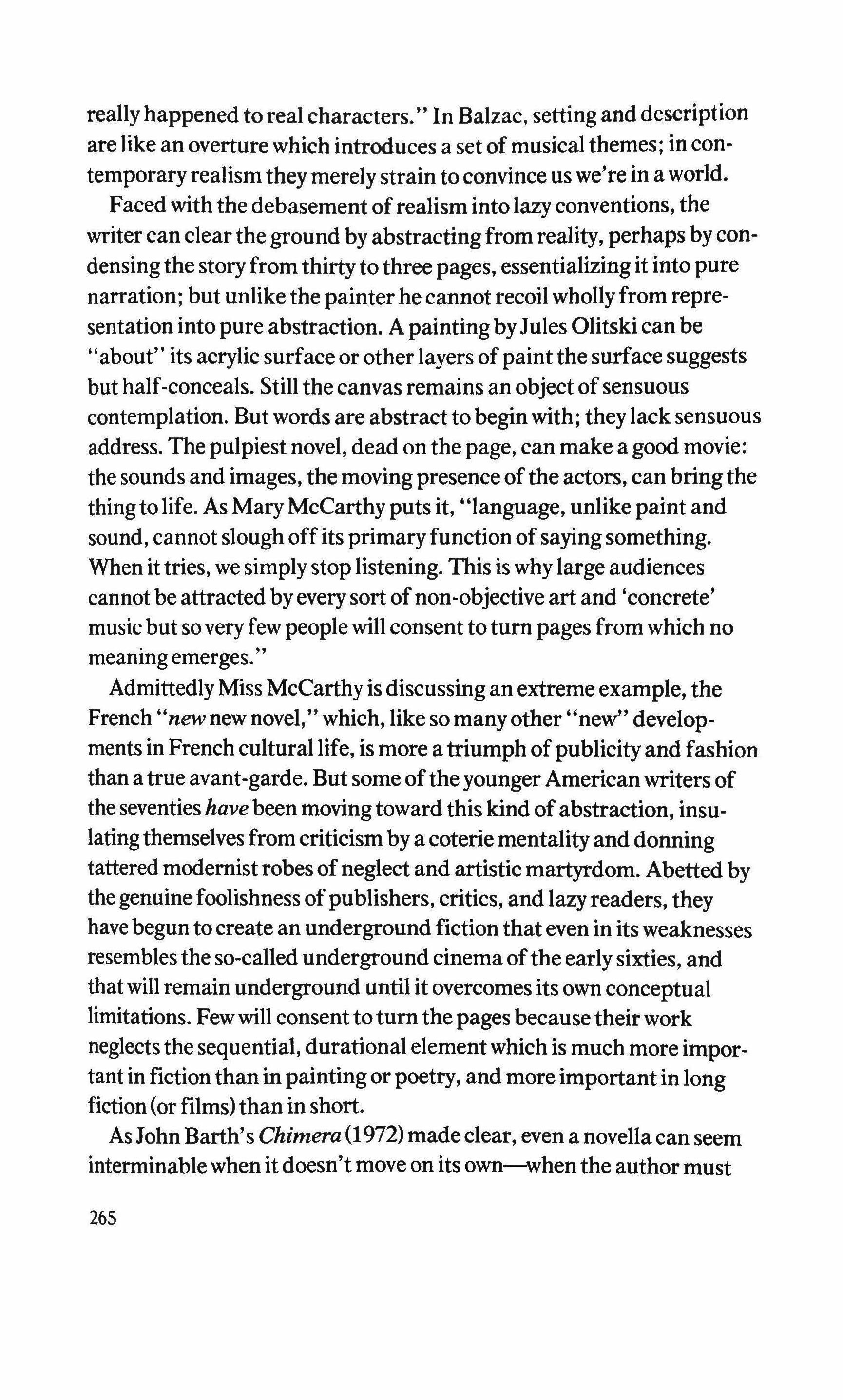
reallyhappened to real characters." In Balzac, setting and description are like an overture which introduces a set of musical themes; in contemporary realism theymerely strain to convince us we're in a world.
Faced with the debasement ofrealism into lazyconventions, the writer can clearthe ground byabstractingfrom reality, perhapsby condensingthe storyfrom thirty to three pages, essentializingit into pure narration; but unlike the painter he cannot recoil wholly from representation into pure abstraction. A paintingbyJules Olitski can be "about" its acrylic surface or other layers ofpaint the surface suggests but half-conceals. Still the canvas remains an object of sensuous contemplation. But words are abstract to beginwith; they lack sensuous address. The pulpiest novel, dead on the page, can make a good movie: the sounds and images, the moving presence ofthe actors, can bringthe thingto life. As MaryMcCarthyputs it, "language, unlike paint and sound, cannot slough offits primaryfunction ofsayingsomething. When ittries, we simply stop listening. This is whylarge audiences cannot be attracted byevery sort ofnon-objective art and 'concrete' music but so very few people will consent to turn pages from which no meaningemerges."
Admittedly Miss McCarthy is discussing an extreme example, the French "new new novel," which, like so many other "new" developments in French cultural life, is more a triumph ofpublicityand fashion than a true avant-garde, But some oftheyounger Americanwriters of the seventies have been moving toward this kind of abstraction, insulatingthemselves from criticism by a coterie mentality and donning tattered modernist robes ofneglect and artistic martyrdom. Abetted by the genuine foolishness ofpublishers, critics, and lazyreaders, they havebegun to create an underground fiction that even in its weaknesses resembles the so-called underground cinemaofthe earlysixties, and thatwill remain underground until it overcomes its own conceptual limitations. Fewwill consent toturn the pages becausetheir work neglects the sequential, durational element which is much more important in fiction than in painting or poetry, and more important in long fiction(orfilms) than in short.
As John Barth's Chimera (1972) made clear, even a novella can seem interminable when itdoesn't move on its own-whenthe author must
265
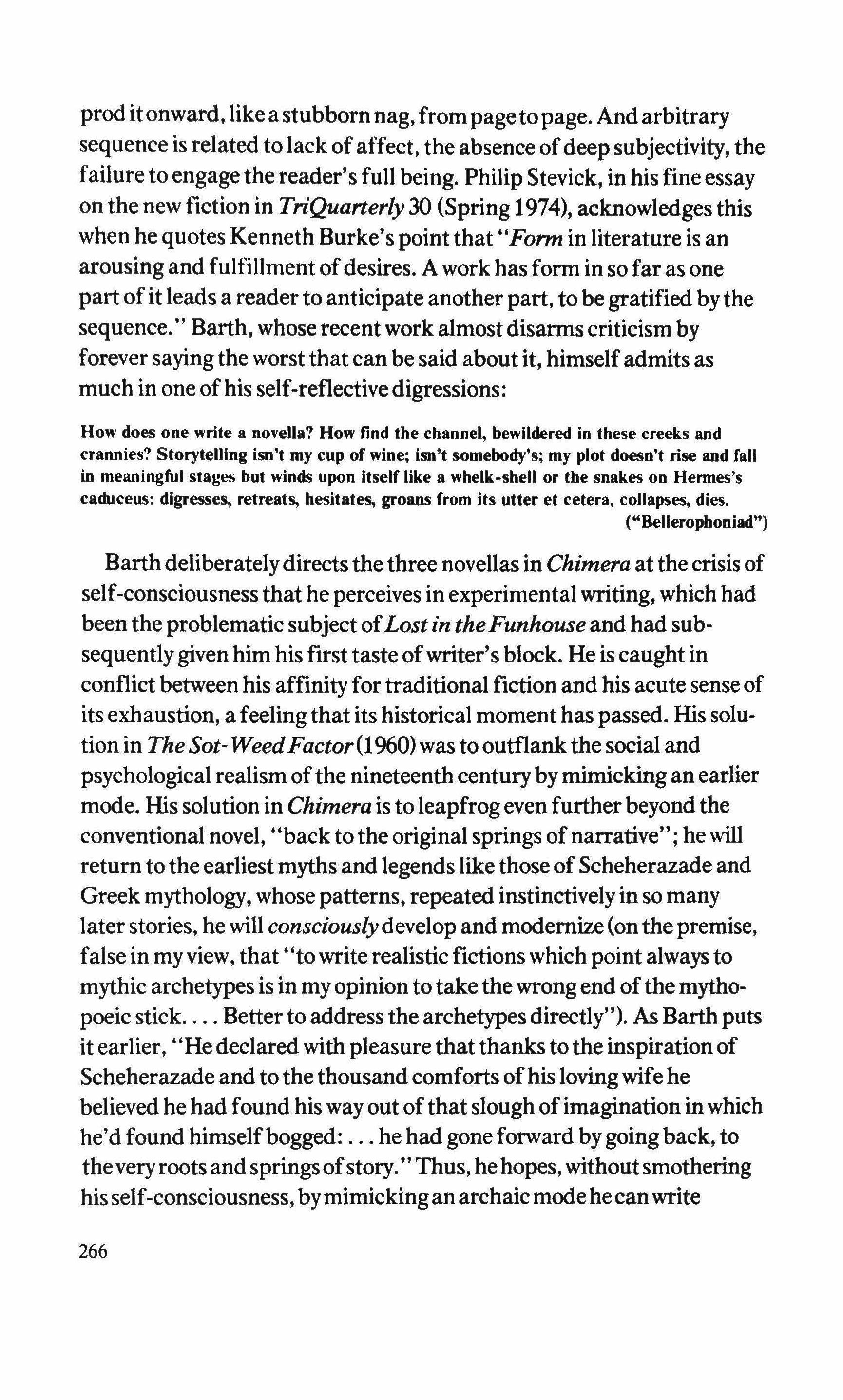
prod itonward, like a stubborn nag, from pagetopage. And arbitrary sequence is related to lack of affect, the absence ofdeepsubjectivity, the failure to engage the reader's full being. Philip Stevick, in his fine essay on the new fiction in TriQuarterly 30 (Spring 1974), acknowledges this when he quotes Kenneth Burke's point that "Form in literature is an arousing and fulfillment ofdesires. A work has form in so far as one part ofit leads a reader to anticipate another part, to be gratified bythe sequence." Barth, whose recent work almostdisarms criticism by forever sayingthe worst that can be said about it, himselfadmits as much in one ofhis self-reflectivedigressions:
How does one write a novella? How find the channel, bewildered in these creeks and crannies? Storytelling isn't my cup of wine; isn't somebody's; my plot doesn't rise and fall in meaningful stages but winds upon itself like a whelk-shell or the snakes on Hermes's caduceus: digresses, retreats, hesitates, groans from its utter et cetera, collapses, dies. ("Belleropboniad")
Barth deliberatelydirects the three novellas in Chimera at the crisis of self-consciousnessthat he perceives in experimentalwriting, which had been the problematicsubject ofLost in theFunhouse and had subsequentlygiven him his first taste ofwriter's block. He is caught in conflict between his affinity for traditional fiction and his acute sense of its exhaustion, a feelingthat its historical moment has passed. His solution in TheSot- WeedFactor(1960) was to outflankthe social and psychological realism ofthe nineteenth centurybymimicking an earlier mode. His solution in Chimera is to leapfrog even furtherbeyond the conventional novel, "back to the original springs ofnarrative"; he will return to the earliest myths and legends like those of Scheherazade and Greek mythology, whose patterns, repeatedinstinctivelyin so many later stories, he will consciouslydevelop and modernize(onthe premise, false in my view, that''towrite realistic fictions which point always to mythic archetypes is in my opinion to takethewrongend ofthe mythopoeic stick Better to address the archetypesdirectly"). As Barth puts it earlier, "He declared with pleasure thatthanks to the inspirationof Scheherazade and to thethousand comforts ofhis lovingwife he believed he had found his way out ofthat slough ofimagination inwhich he'd found himselfbogged: he had gone forward bygoingback, to theveryroots and springsofstory." Thus, hehopes, withoutsmothering hisself-consciousness,bymimicking an archaicmodehe can write
266
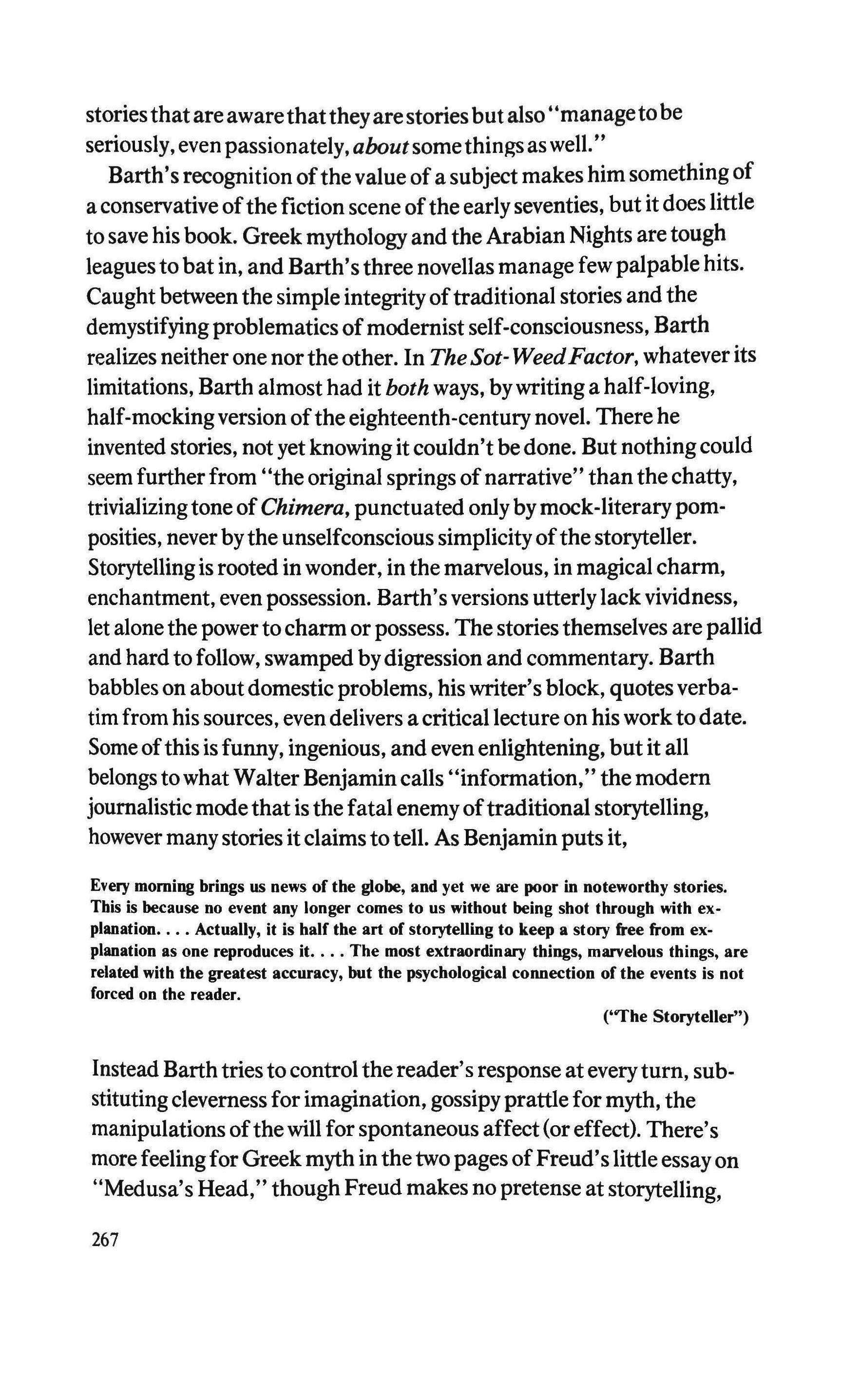
storiesthat are aware thatthey are storiesbut also"managetobe seriously, even passionately, about some things as well."
Barth's recognition ofthe value of a subject makes him something of a conservative ofthe fiction scene ofthe earlyseventies, but it does little to save his book. Greek mythologyand the Arabian Nights are tough leagues to bat in, and Barth's three novellas manage fewpalpable hits. Caught between the simpleintegrityoftraditional stories and the demystifyingproblematics ofmodernist self-consciousness, Barth realizes neither one nor theother. In TheSot-WeedFactor, whatever its limitations, Barth almost had it both ways, bywriting a half-loving, half-mockingversion ofthe eighteenth-century novel. There he invented stories, not yetknowing it couldn't be done. But nothing could seem furtherfrom''the original springs ofnarrative" than the chatty, trivializingtone ofChimera, punctuated onlyby mock-literary pomposities, never bythe unselfconscious simplicityofthe storyteller. Storytellingis rooted in wonder, in the marvelous, in magical charm, enchantment, even possession. Barth's versions utterly lack vividness, let alonethe power to charm or possess. The stories themselves are pallid and hard to follow, swampedbydigression and commentary. Barth babbles on about domestic problems, his writer's block, quotesverbatim from his sources, even delivers a critical lecture on his work to date. Some ofthis isfunny, ingenious, and even enlightening, but it all belongs to what Walter Benjamincalls "information," themodern journalistic modethat is the fatal enemy oftraditional storytelling, however manystories itclaims to tell. As Benjamin putsit,
Every morning brings us news of the globe, and yet we are poor in noteworthy stories. Tbis is because no event any longer comes to us without being shot through with explanation Actually, it is half the art of storytelling to keep a story free from explanation as one reproduces it The most extraordinary things, marvelous things, are related with the greatest accuracy, but the psychological connection of the events is not forced on the reader.
("The Storyteller")
Instead Barth tries to control the reader's response at everyturn, substitutingcleverness for imagination, gossipyprattlefor myth, the manipulations ofthe will for spontaneous affect(oreffect). There's more feelingfor Greek myth in the two pages ofFreud's little essay on "Medusa's Head," though Freud makes no pretense at storytelling,
267
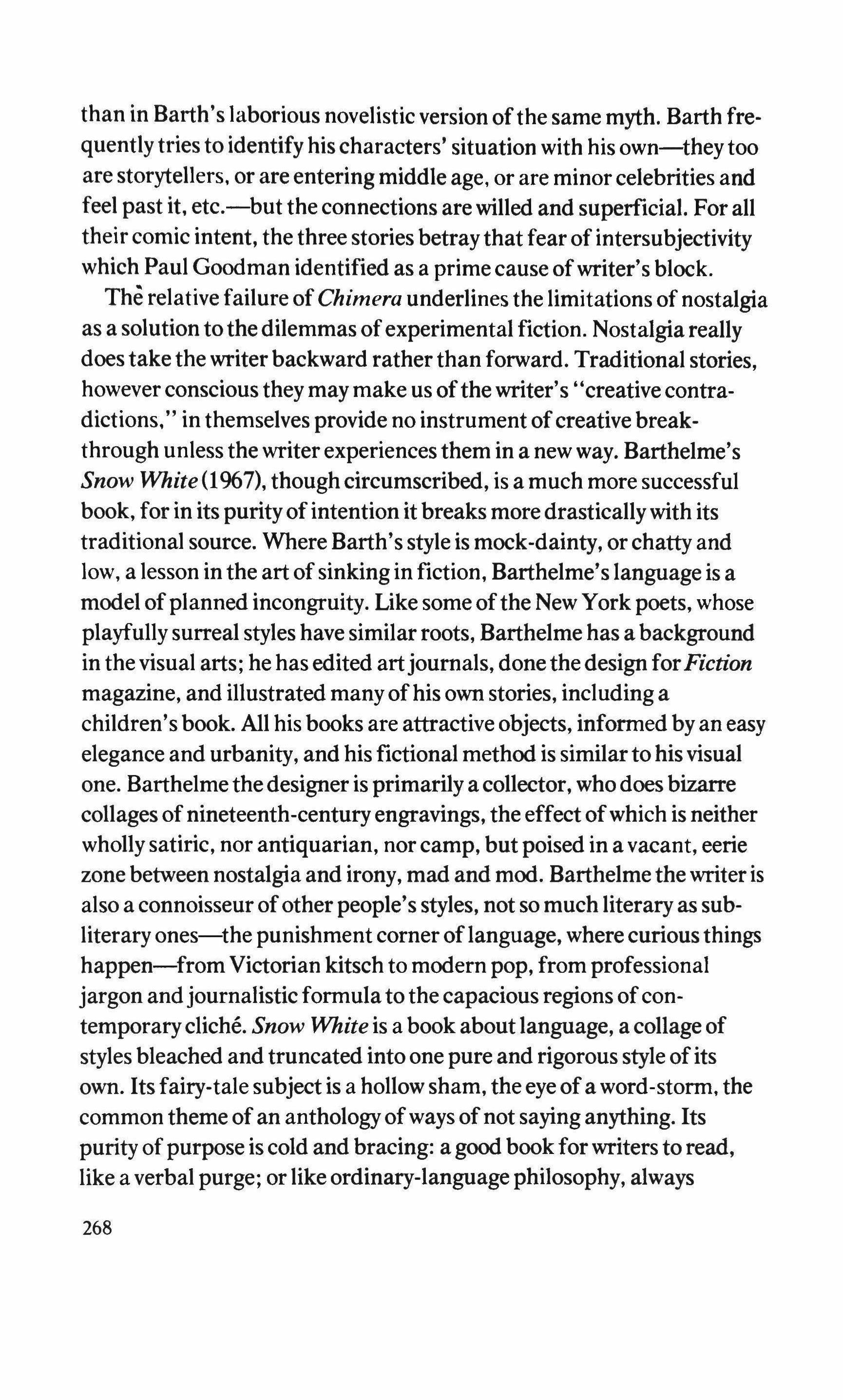
than in Barth's laborious novelistic version ofthe same myth. Barth frequentlytries to identify his characters' situation with his own-they too are storytellers, or are entering middle age, or are minor celebrities and feel past it, etc.-but the connections are willed and superficial. For all their comic intent, the three stories betraythat fear of intersubjectivity which Paul Goodman identified as a prime cause ofwriter's block. The relative failure ofChimera underlines the limitations of nostalgia as a solution to the dilemmas ofexperimental fiction. Nostalgiareally does take the writer backward rather than forward. Traditional stories, however conscious they may make us ofthe writer's "creative contradictions," in themselves provide no instrument ofcreative breakthrough unless the writer experiences them in a new way. Barthelme's Snow White (1967), thoughcircumscribed, is a much more successful book, for in its purity ofintention it breaks more drasticallywith its traditional source. Where Barth's style is mock-dainty, or chatty and low, a lesson in the art ofsinking in fiction, Barthelme's language is a model ofplannedincongruity. Like some ofthe New York poets, whose playfully surreal styles have similar roots, Barthelme has a background in the visual arts; he has edited artjournals, donethe design forFiction magazine, and illustrated many ofhis own stories, including a children's book. All his books are attractive objects, informed by an easy elegance and urbanity, and his fictional method is similarto hisvisual one. Barthelme thedesigner is primarily a collector, who does bizarre collages of nineteenth-centuryengravings, the effect ofwhich is neither whollysatiric, nor antiquarian, nor camp, but poised in a vacant, eerie zone between nostalgia and irony, mad and mod. Barthelme the writeris also a connoisseur ofother people'sstyles, not so much literary as subliterary ones-the punishment corner oflanguage, where curious things happen-from Victorian kitsch to modern pop, from professional jargon andjournalistic formula to the capaciousregions of contemporarycliche. Snow White is a book about language, a collage of styles bleached and truncated into one pure and rigorousstyle ofits own. Its fairy-talesubject is a hollow sham, the eye of a word-storm, the common theme of an anthologyofways ofnot sayinganything. Its purity ofpurpose is cold and bracing: a good book for writers to read, like a verbal purge; or like ordinary-languagephilosophy, always
268
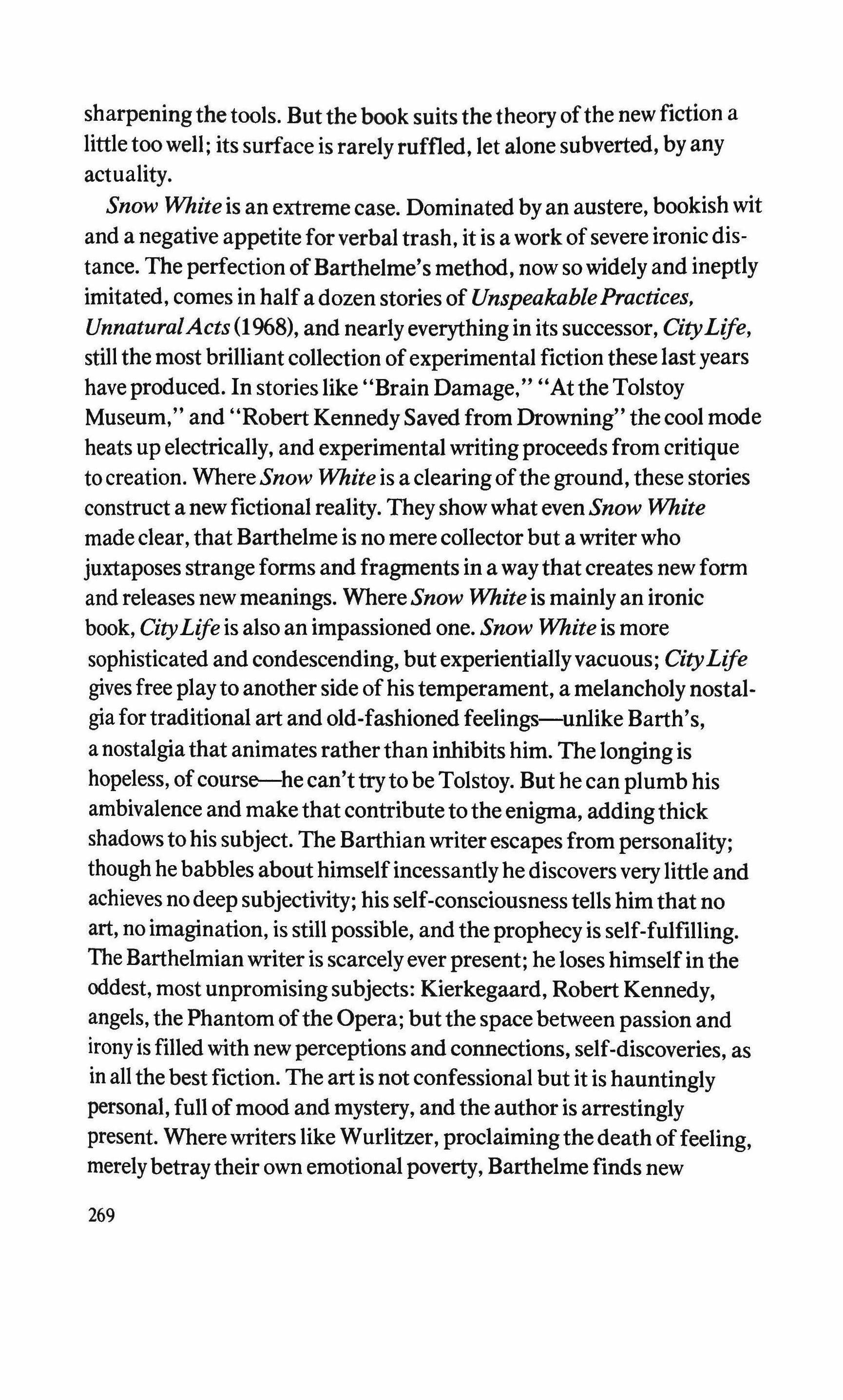
sharpeningthetools. But the book suits the theory ofthe new fiction a little too well; its surface is rarelyruffled, let alone subverted, by any actuality.
Snow White is an extreme case. Dominated by an austere, bookish wit and a negative appetite forverbal trash, it is a work of severe ironic distance. The perfection ofBarthelme's method, now so widely and ineptly imitated, comes in half a dozen stories of UnspeakablePractices, UnnaturalActs (1968), and nearlyeverything in its successor, CityLife, still the most brilliant collection ofexperimental fiction these lastyears have produced. In stories like"Brain Damage," "Atthe Tolstoy Museum," and "Robert Kennedy Saved from Drowning" the cool mode heats up electrically, and experimentalwritingproceeds from critique to creation. Where Snow White is a clearing ofthe ground, these stories construct a new fictional reality. They showwhat even Snow White madeclear, that Barthelme is no mere collector but a writer who juxtaposes strange forms and fragments in a waythat creates new form and releases new meanings. WhereSnow White is mainly an ironic book, CityLife is also an impassioned one. Snow White is more sophisticated and condescending, butexperientially vacuous; CityLife gives free play to another side ofhistemperament, a melancholy nostalgia for traditional art and old-fashioned feelings-unlike Barth's, a nostalgiathat animates ratherthan inhibits him. The longingis hopeless, ofcourse--he can'ttryto be Tolstoy. But he can plumb his ambivalence and make that contribute to the enigma, addingthick shadows to his subject. The Barthian writer escapes from personality; though he babbles about himselfincessantly he discovers very little and achieves no deepSUbjectivity; his self-consciousness tellshim that no art, no imagination, is still possible, and the prophecy is self-fulfilling. The Barthelmianwriter is scarcely ever present; he loses himselfin the oddest, most unpromisingSUbjects: Kierkegaard, Robert Kennedy, angels, the Phantom ofthe Opera; butthe spacebetween passion and ironyis filled with new perceptions and connections, self-discoveries, as in all the best fiction. The art is not confessional but it is hauntingly personal, full ofmood and mystery, and the author is arrestingly present. Wherewriters like Wurlitzer, proclaimingthedeath offeeling, merelybetraytheir own emotional poverty, Barthelme finds new
269
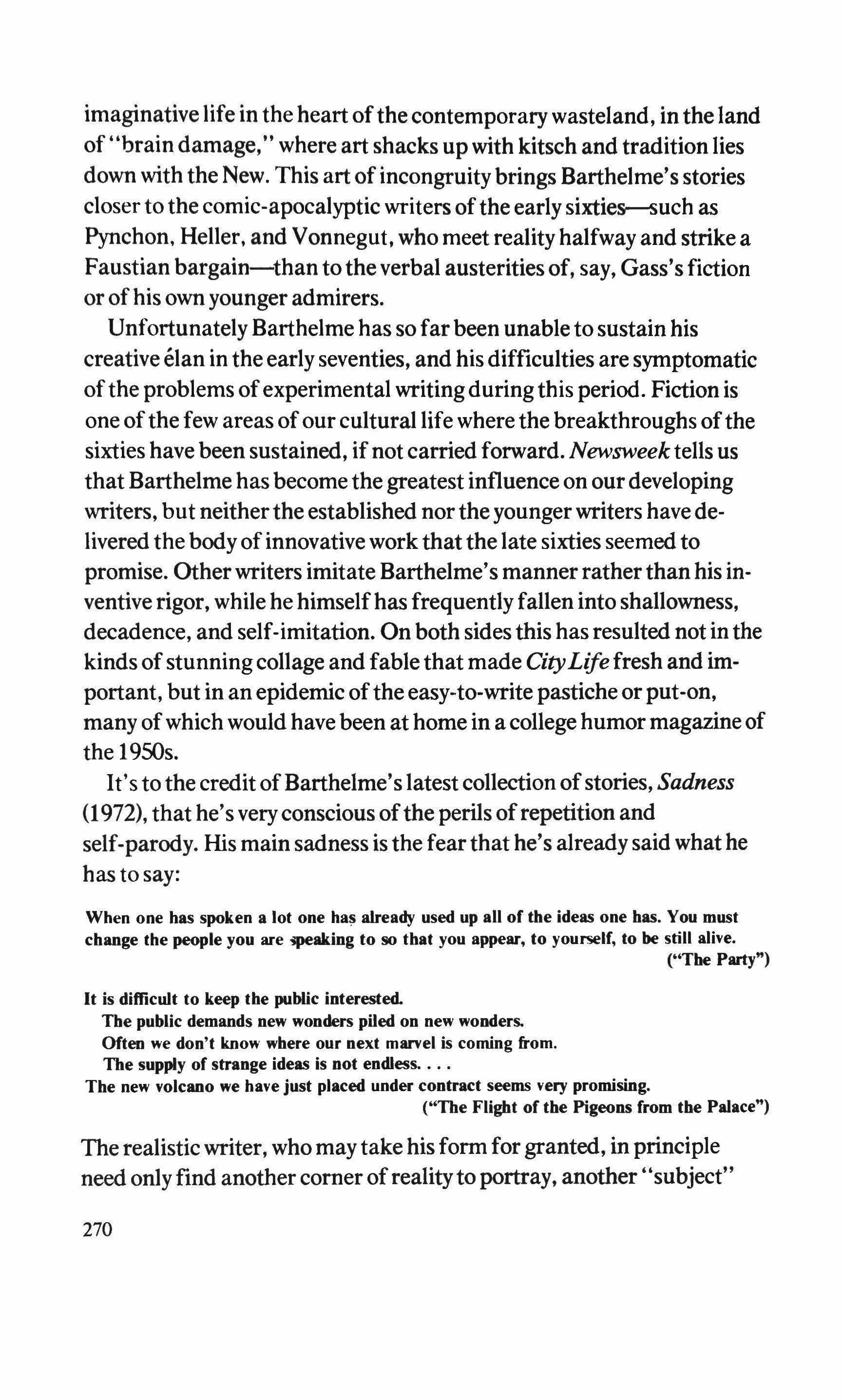
imaginative life in the heart ofthe contemporary wasteland, in the land of''brain damage," where art shacks up with kitsch and tradition lies down with the New. This art ofincongruitybrings Barthelme's stories closer to the comic-apocalyptic writers ofthe early sixties=-such as Pynchon, Heller, and Vonnegut, who meet realityhalfway and strike a Faustian bargain-than to the verbal austerities of, say, Gass's fiction or ofhis own younger admirers.
Unfortunately Barthelme has so farbeen unable to sustain his creative elan in the earlyseventies, and his difficulties are symptomatic ofthe problems ofexperimental writingduringthis period. Fiction is one ofthe few areas of our cultural life where the breakthroughs ofthe sixties have been sustained, if not carried forward. Newsweektells us that Barthelme has become the greatest influence on our developing writers, but neitherthe established nor theyounger writers have delivered the body of innovative work that the late sixties seemed to promise. Other writers imitate Barthelme's manner rather than his inventive rigor, while he himselfhas frequently fallen into shallowness, decadence, and self-imitation. On both sides this has resulted not in the kinds ofstunningcollage and fable that made CityLifefresh and important, but in an epidemic ofthe easy-to-writepastiche or put-on, many ofwhich would have been at home in a college humor magazineof the 1950s.
It's to the credit of Barthelme's latest collection ofstories, Sadness (1972), that he's very conscious ofthe perils ofrepetition and self-parody. His main sadness is the fearthat he's already said what he has to say:
When one has spoken a lot one has already used up all of the ideas one bas. You must cbange the people you are ipeaking to so tbat you appear, to yourself, to be still alive. ("The Party")
It is difficult to keep tbe public interested.
The public demands new wonders piled on new wonders.
Often we don't know wbere our next marvel is coming from.
The supply of strange ideas is not endless Tbe new volcano we have just placed under contract seems very promising. ("The Flight of tbe Pigeons from tbe Palace")
The realistic writer, who may take his form for granted, in principle need onlyfind another corner ofrealityto portray, another "subject"
270
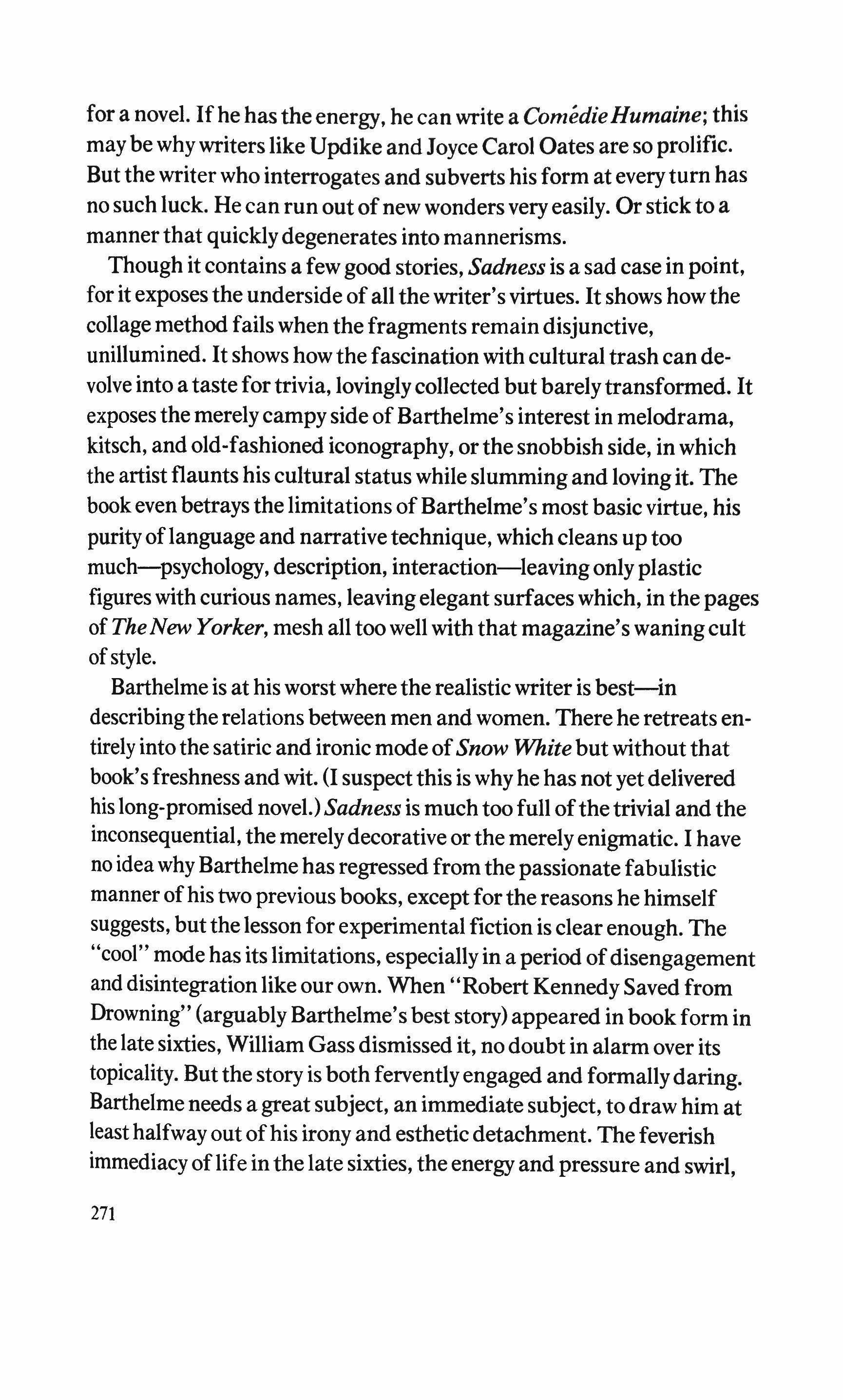
for a novel. If he has the energy, he can write a ComedieHumaine; this may be whywriters like Updike and Joyce Carol Oates are so prolific. But the writer who interrogates and subverts his form at every turn has no such luck. He can run out of new wonders very easily. Or stick to a manner that quicklydegenerates into mannerisms.
Though it contains a fewgood stories, Sadness is a sad case in point, for it exposes the underside of all the writer's virtues. It shows howthe collage method fails when the fragments remain disjunctive, unillumined. It shows how the fascination with cultural trash can devolve into a taste fortrivia, lovingly collected but barelytransformed. It exposes the merelycampy side of Barthelme' s interest in melodrama, kitsch, and old-fashioned iconography, or the snobbish side, in which the artist flaunts his cultural status while slumming and lovingit. The book even betrays the limitations of Barthelme's most basic virtue, his purityoflanguage and narrative technique, which cleans up too much-psychology, description, interaction-leaving onlyplastic figures with curious names, leavingelegant surfaces which, in the pages of TheNew Yorker, mesh all too well with that magazine'swaningcult ofstyle.
Barthelme is at his worst wherethe realistic writer is best-in describingthe relations between men and women. There he retreats entirely into the satiric and ironic mode ofSnow Whitebutwithout that book's freshness and wit. (I suspectthis is why he has not yetdelivered his long-promised novel.) Sadness is much too full ofthetrivial and the inconsequential, the merelydecorative or the merelyenigmatic. I have no idea why Barthelme has regressed from the passionate fabulistic manner ofhis two previousbooks, except forthe reasons he himself suggests, butthelesson for experimental fiction is clear enough. The "cool" mode has its limitations, especially in a period ofdisengagement and disintegration like our own. When "Robert Kennedy Saved from Drowning" (arguably Barthelme's best story)appeared in book form in the late sixties, William Gass dismissed it, no doubt in alarm over its topicality. But the story is both ferventlyengaged and formallydaring. Barthelme needs a greatSUbject, an immediate subject, to draw him at leasthalfway out ofhis irony and esthetic detachment. The feverish immediacy oflife in the late sixties, the energy and pressure and swirl,
271
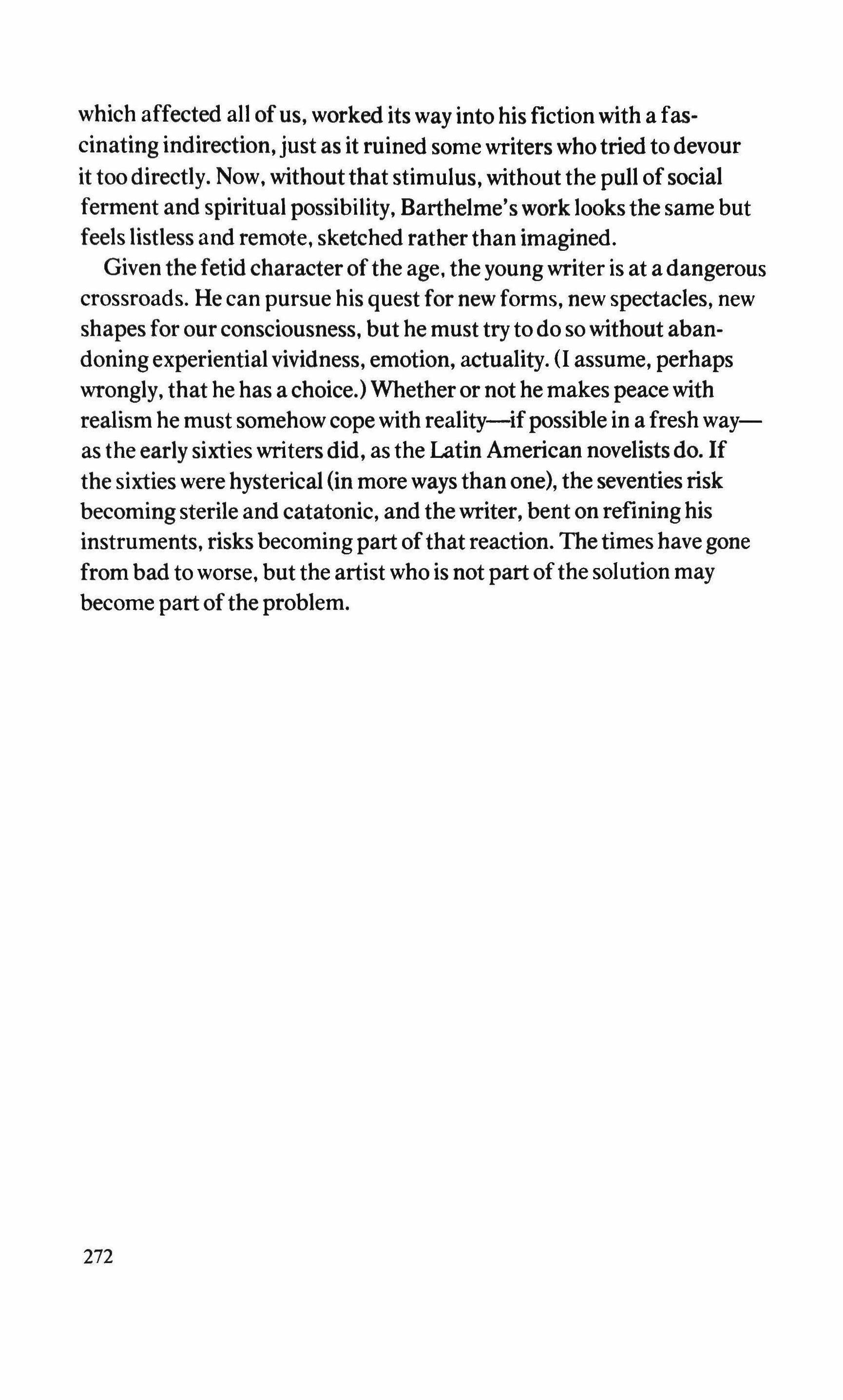
which affected all of us, worked its way into his fiction with a fascinating indirection,just as it ruined some writers whotried to devour it too directly. Now. withoutthat stimulus, without the pull ofsocial ferment and spiritual possibility. Barthelme's work looks the same but feels listless and remote. sketched rather than imagined.
Given the fetid character ofthe age. the young writer is at a dangerous crossroads. He can pursue his quest for new forms. new spectacles, new shapes for our consciousness. but he must try to do so without abandoningexperientialvividness, emotion, actuality. (I assume, perhaps wrongly. that he has a choice.) Whether or not he makes peace with realism he must somehow cope with reality-ifpossible in a fresh wayas the early sixties writers did, as the Latin American novelists do. If the sixties were hysterical (in more ways than one), the seventies risk becomingsterile and catatonic, and the writer, bent on refining his instruments. risks becomingpart ofthat reaction. The times have gone from bad to worse. but the artist who is not part ofthe solution may become part ofthe problem.
272
The corpse ofthe dragon: notes on postromantic fiction
Frank McConnell
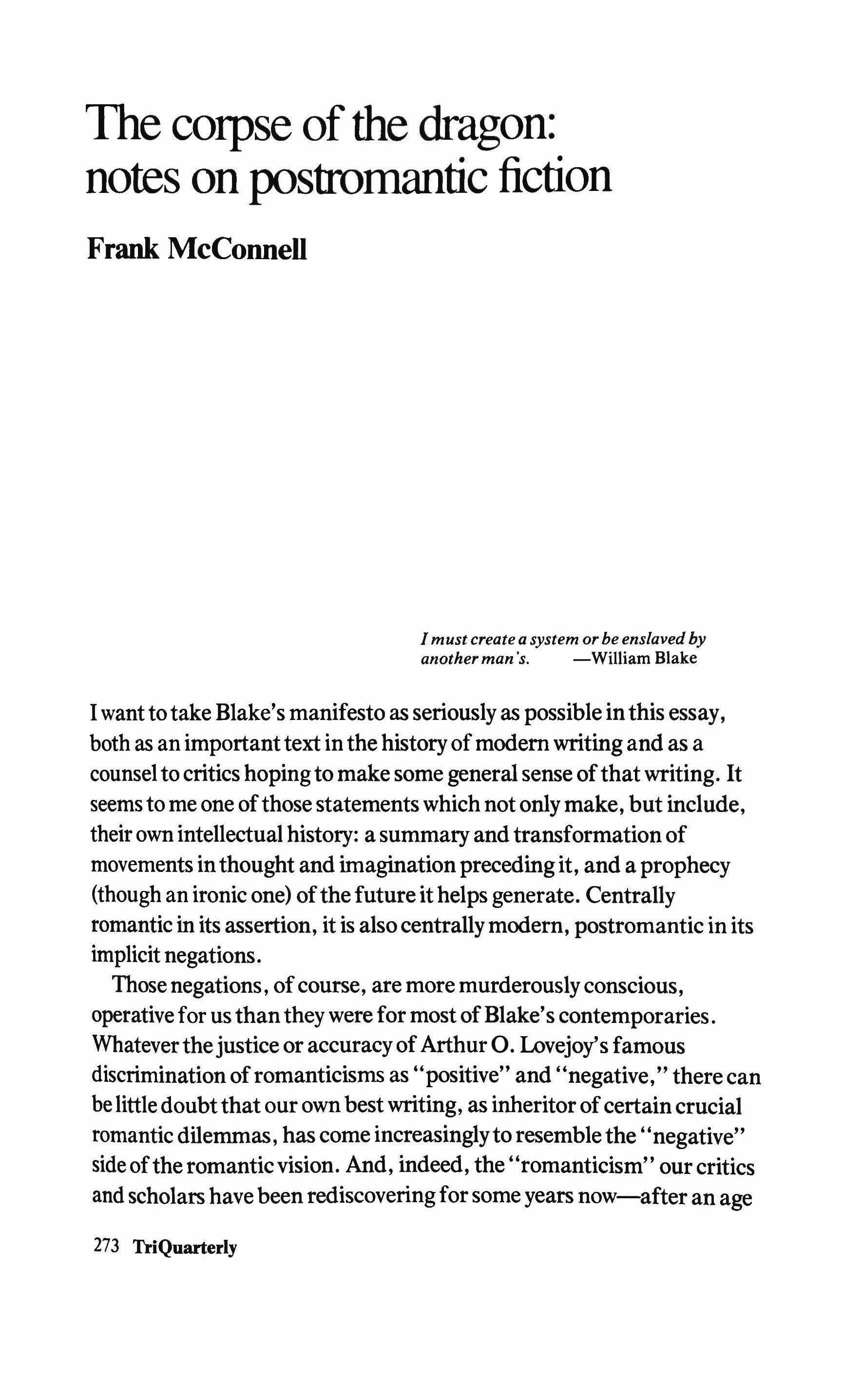
I must create a system or be enslaved by another man 's. -William Blake
I want totake Blake's manifesto as seriously as possible inthis essay, both as an importanttext inthe historyofmodern writing and as a counsel to critics hopingto make some general sense ofthat writing. It seems to me one ofthose statements which not onlymake, but include, their own intellectual history: a summary and transformation of movements inthought and imaginationprecedingit, and a prophecy <though an ironic one) ofthefuture ithelps generate. Centrally romantic in its assertion, it is alsocentrallymodern, postromantic in its implicitnegations.
Those negations, of course, are more murderouslyconscious, operativefor us than they were for most ofBlake's contemporaries. Whateverthejustice or accuracy ofArthurO. Lovejoy's famous discrimination ofromanticisms as "positive" and "negative," there can be little doubtthat our own best writing, as inheritor ofcertain crucial romantic dilemmas, has come increasinglyto resemble the "negative" sideoftheromanticvision. And, indeed, the "romanticism" our critics and scholars have been rediscoveringfor some years now-after an age
273 TriQuarterly
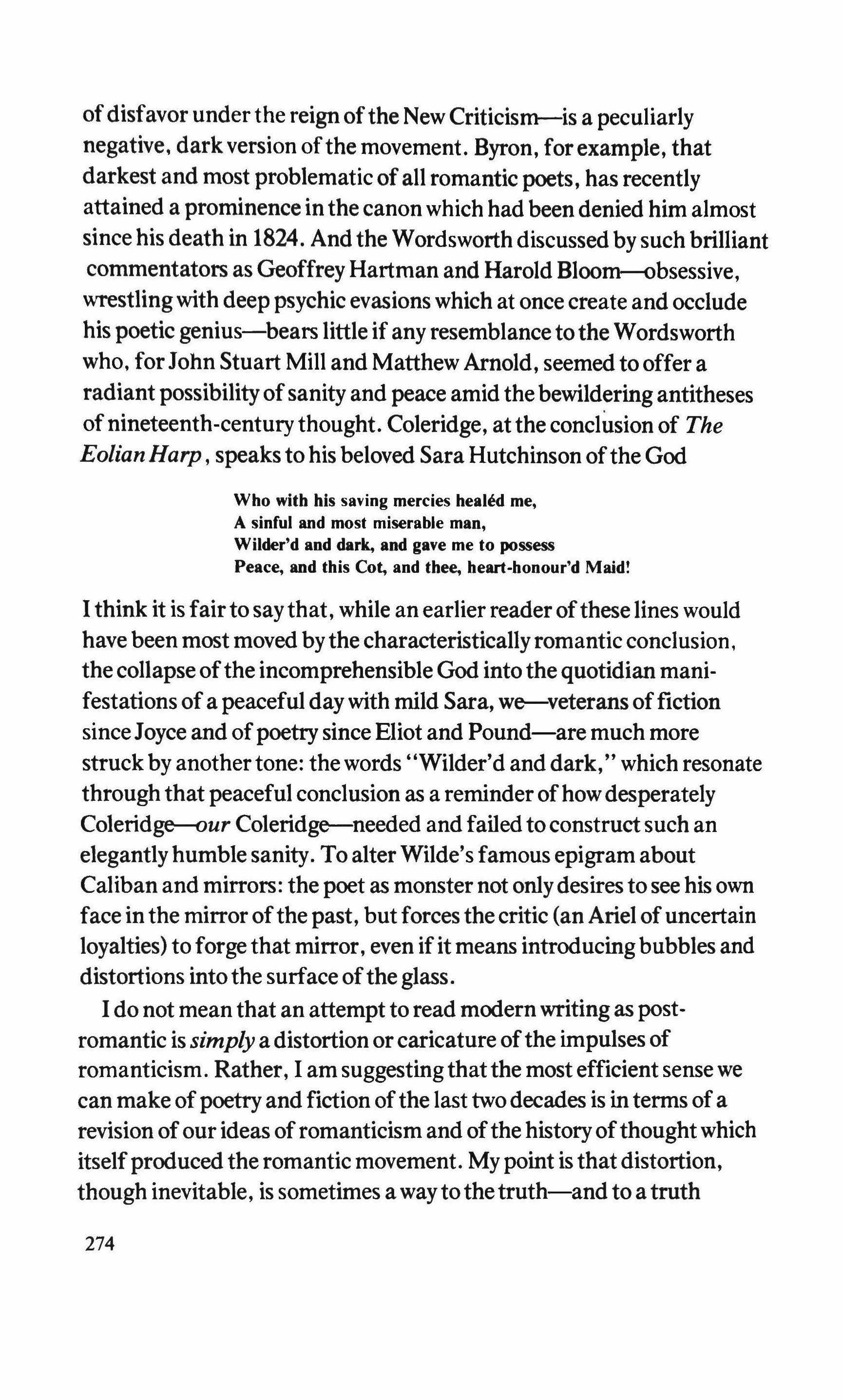
ofdisfavor under the reign ofthe New Criticism-is a peculiarly negative. darkversion ofthe movement. Byron, forexample, that darkest and most problematic ofall romantic poets, has recently attained a prominence inthe canon which had been denied him almost since his death in 1824. And the Wordsworth discussed by such brilliant commentators as Geoffrey Hartman and Harold Bloom-obsessive, wrestlingwith deeppsychic evasions which at once create and occlude his poetic genius-bears little if any resemblance to the Wordsworth who, forJohn Stuart Mill and Matthew Arnold, seemed to offer a radiant possibilityofsanity and peace amid thebewildering antitheses ofnineteenth-centurythought. Coleridge, at the conclusion of The Eolian Harp, speaks to his beloved Sara Hutchinson ofthe God
Who with his saving mercies healed me, A sinful and most miserable man, Wilder'd and dark, and gave me to possess Peace, and this Cot, and thee, heart-honour'd Maid!
I think it is fairto saythat, while an earlier reader ofthese lines would have been most moved bythe characteristicallyromantic conclusion, thecollapse ofthe incomprehensible God into the quotidian manifestations of a peacefuldaywith mild Sara, we-veterans offiction sinceJoyce and ofpoetry since Eliot and Pound-are much more struck by another tone: thewords "Wilder'd and dark," which resonate through that peaceful conclusion as a reminderofhowdesperately Coleridge--our Coleridge-needed and failed to construct such an elegantlyhumble sanity. To alter Wilde's famous epigram about Caliban and mirrors: the poet as monster not onlydesires to see his own face in the mirror ofthe past, but forces thecritic (an Ariel ofuncertain loyalties) to forge that mirror, even ifit means introducing bubbles and distortions intothe surface ofthe glass.
I do not mean that an attempt to read modern writing as postromantic is simply a distortion or caricature ofthe impulses of romanticism. Rather, I am suggestingthatthe most efficient sense we can make ofpoetry and fiction ofthe last two decades is in terms of a revision of our ideas ofromanticism and ofthe history ofthoughtwhich itselfproduced the romantic movement. Mypoint is that distortion, though inevitable, is sometimes a waytothetruth-and to a truth
274
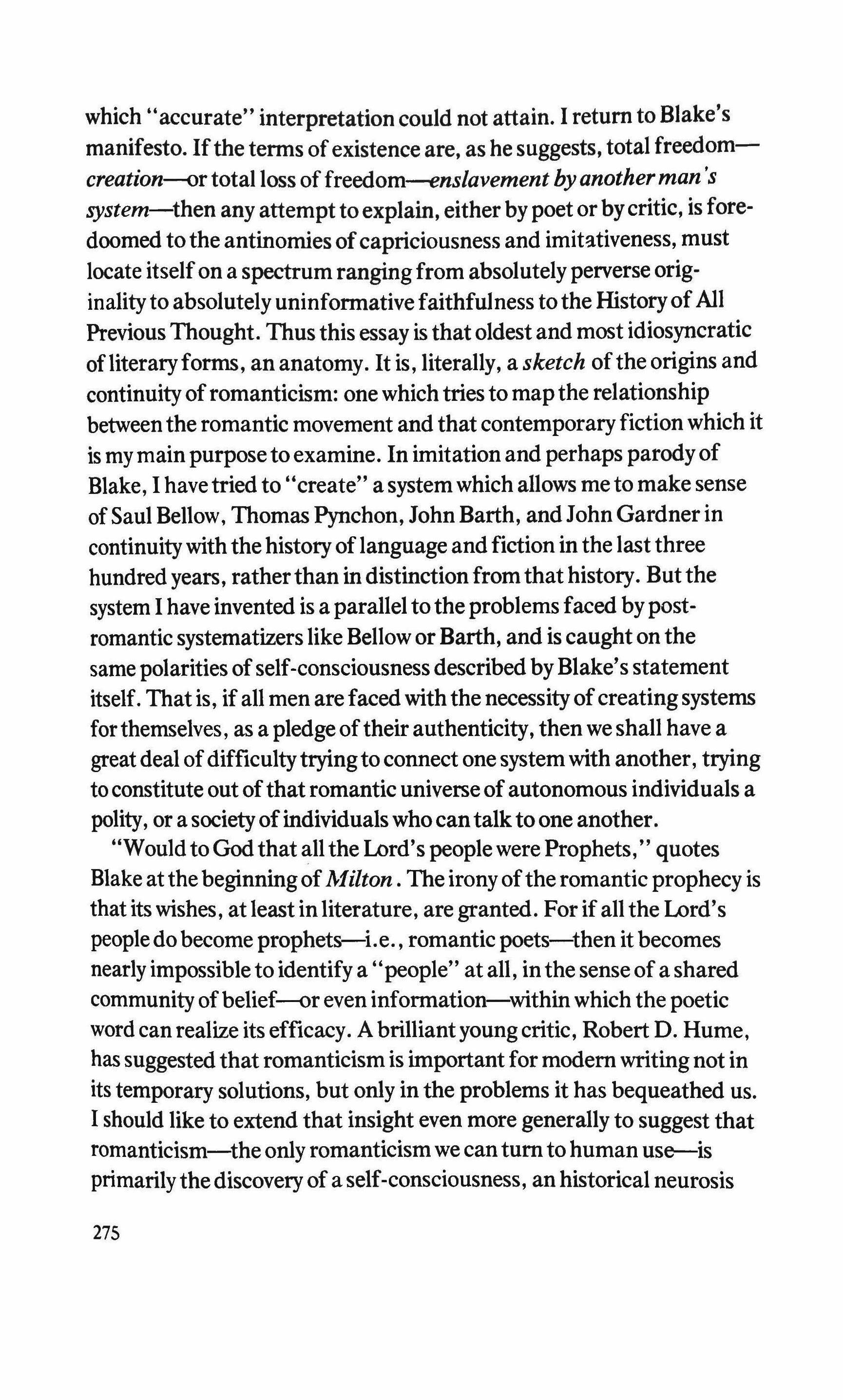
which "accurate" interpretation could not attain. I return to Blake's manifesto. Ifthe terms ofexistence are, as he suggests, total freedomcreation-ortotal loss offreedom--enslavement byanotherman's system-then any attempt to explain, eitherbypoet or bycritic, is foredoomed to the antinomies ofcapriciousness and imitativeness, must locate itself on a spectrumranging from absolutely perverse originality to absolutely uninformative faithfulness to the HistoryofAll Previous Thought. Thus this essay is that oldest and most idiosyncratic ofliteraryforms, an anatomy. It is, literally, a sketch ofthe origins and continuity ofromanticism: one which tries to map the relationship between the romantic movement and that contemporary fiction which it is mymainpurpose toexamine. In imitation and perhapsparodyof Blake, I havetried to "create" a systemwhich allows me to make sense ofSaul Bellow, Thomas Pynchon, John Barth, and John Gardner in continuitywiththehistory oflanguage and fiction in the last three hundred years, ratherthan in distinction from that history. But the system I have invented is a parallel to the problems faced bypostromantic systematizers like Bellow or Barth, and is caught on the same polarities ofself-consciousness described byBlake's statement itself. Thatis, ifall men are facedwiththenecessityofcreatingsystems forthemselves, as a pledge oftheir authenticity, then we shall have a great deal ofdifficultytryingto connect one systemwith another, trying to constitute out ofthat romantic universe of autonomous individuals a polity, or a societyofindividuals who can talkto one another.
"Would to God that all the Lord's people were Prophets," quotes Blake at the beginningof Milton. The ironyofthe romantic prophecy is that its wishes, at least inliterature, are granted. For if all the Lord's peopledo become prophets-i.e., romantic poets-then it becomes nearlyimpossible to identify a "people" at all, in the sense of a shared community ofbelief-or even information-within which the poetic word can realize its efficacy. A brilliant young critic, Robert D. Hume, has suggested that romanticism is important for modem writing not in its temporary solutions, but only in the problems it has bequeathed us. I should like to extend that insight even more generally to suggest that romanticism-the only romanticism we can tum to human use--is primarilythediscovery of a self-consciousness, an historical neurosis
275
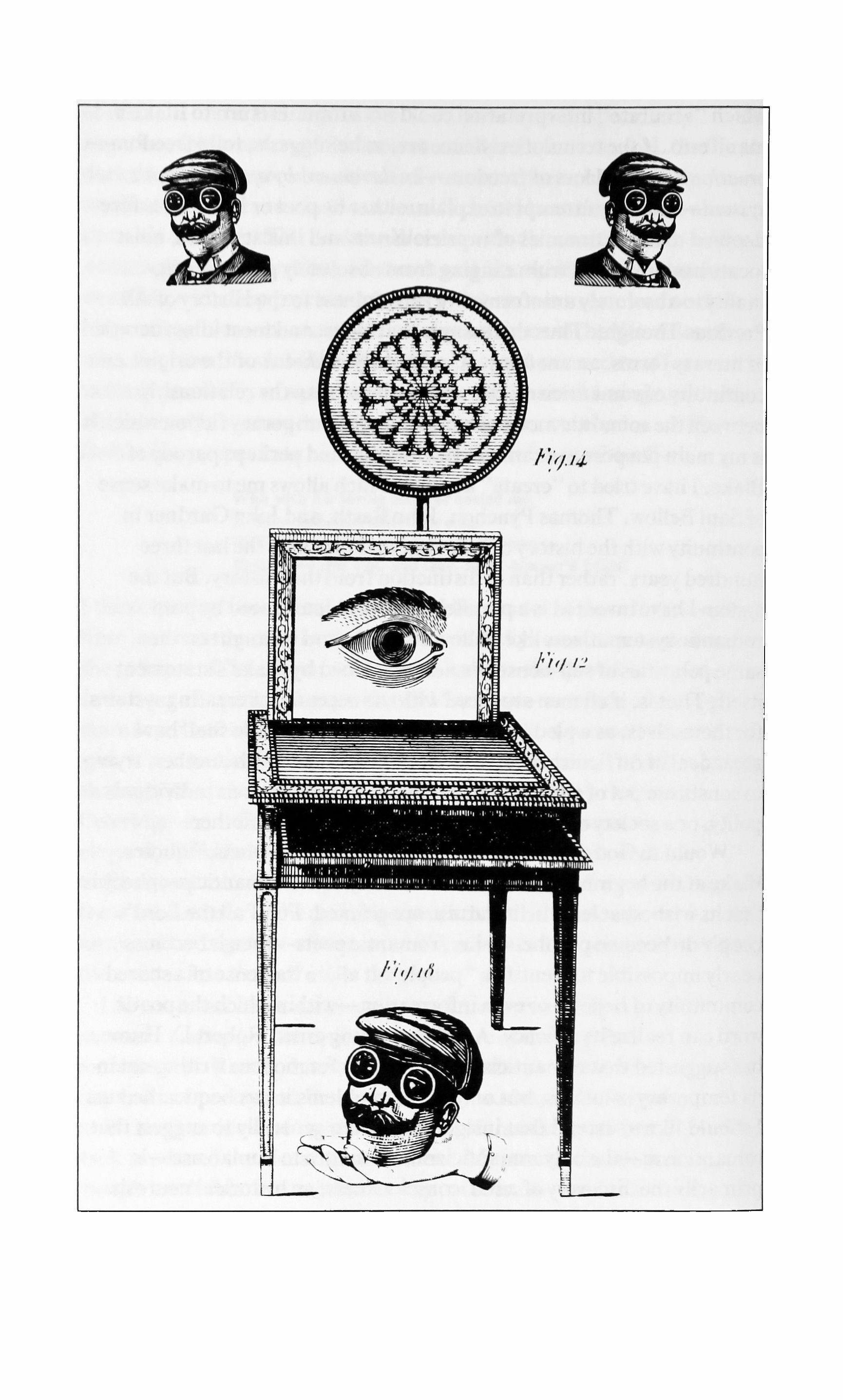

even, from which we cannot, and cannot desire to, escape. Man must "create a system," a language and an idiosyncraticrationalityfor controllingthe world: trying not to do so is like trying to make up a series of absolutely random numbers, or like trying to kill yourselfbyholding your breath. But now-unlike, perhaps, Aquinas or Chaucer-we are aware ofthe impossibility. And since we are aware ofit, our writing and thinkingtake on the form of a struggleagainst it, a struggle to assert, in theface ofthe artificiality and facticityofall thought, an authentically humanvoice, a civilizing idea. "Pereant qui ante nos nostra dixerunt Berryman entitles one of his Dream Songs (#225); may they perish who have written our poems, thought our thoughts before us:
Madness & booze, madness & booze. Whlch'll can tell who preceded whose? What chicken walked out on what egg?
This is not simplythe fearof"unoriginality" but, rather, a terrified sense that "originality" itself, the ideal ofthe originatingWord, maybe onlythe behavioristic illusion of a predestinarian universe. It is one of the grimmestparallels I know to thethesis ofHarold Bloom's study of the moderntradition, TheAnxietyofInfluence, in which Bloom describes the obsessive concern ofthe modernwriterthat his own imaginative life is threatened, impinged upon bythose very figures who are his strongest source of inspiration. The modern writer who, like Berryman, directs his energies-in a profoundlyromantic experiment-toward the invention of a voice which may distinctively carryhis vision is caughtbythe discoverythat that invention of a voice implies, also, the fictiveness, the artificiality, of all speaking voices. Until fmaIIy, that "vision" becomes an obsessive concentration upon thevelleities and possibilities ofthe articulatingvoice itself: Nabokov's ape tracing, again and again, the bars ofits cage.
I hopethe readershares my slight embarrassment at theword "inspiration" in the last paragraph: it is an importantfeature ofexactly thehistory I am tryingto describe. "Inspiration" is an old-fashioned, somehow excessive word for our sense ofliteraryrelationships. And it is the romantic movement, in its concentration uponthe personality ofthe inspired poet and the process ofpoeticinspiration, which paradoxically empties the word of any real usefulness for our own speaking about
277
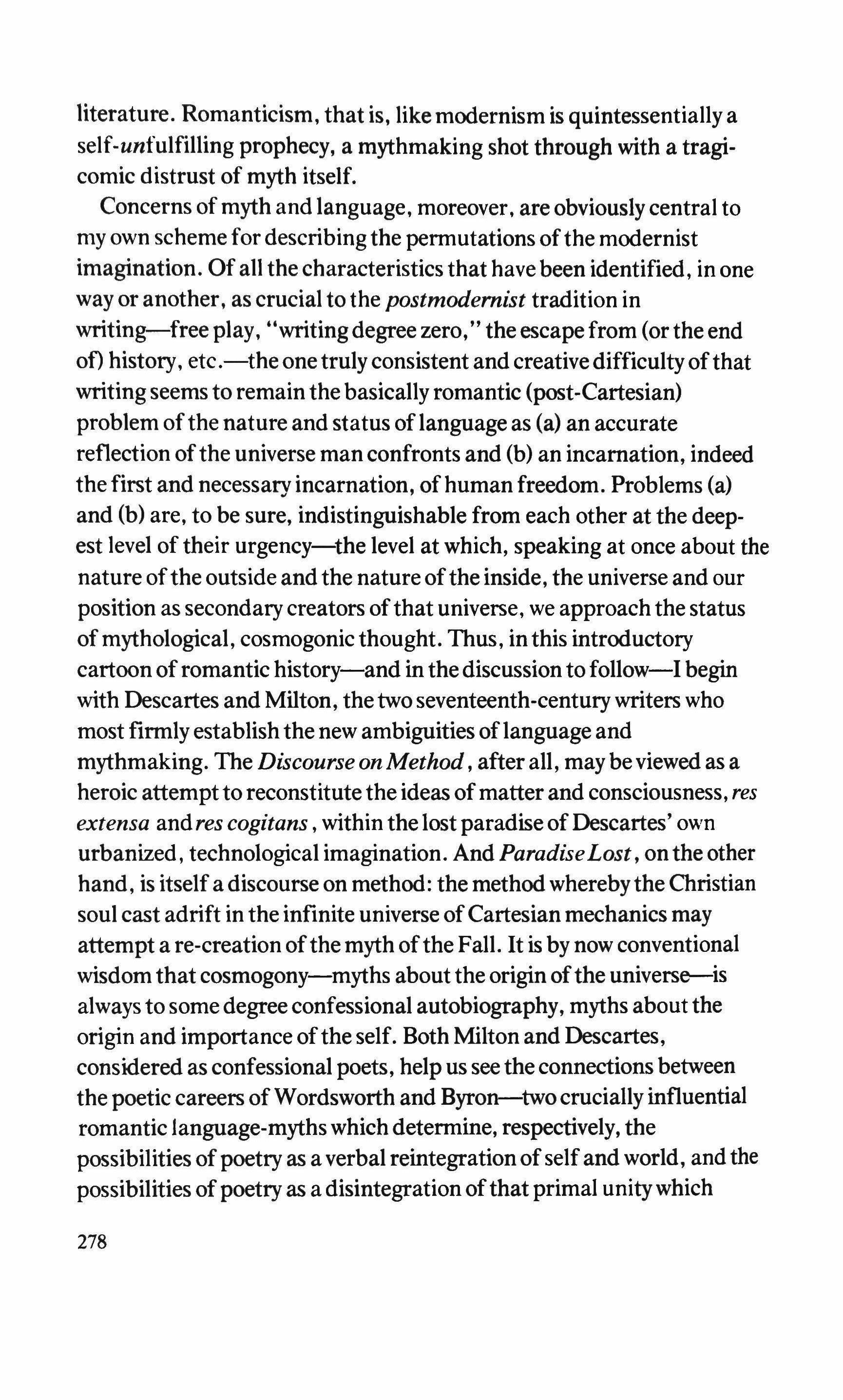
literature. Romanticism, that is, like modernism is quintessentially a self-unfulfillingprophecy, a mythmaking shot through with a tragicomic distrust of myth itself.
Concerns of myth and language, moreover, are obviously central to my own scheme for describing the permutations ofthe modernist imagination. Of all the characteristics that have been identified, in one way or another, as crucial to the postmodernist tradition in writing-freeplay, "writingdegree zero," the escape from (or the end of) history, etc.-the one truly consistent and creative difficultyofthat writing seems to remain the basically romantic (post-Cartesian) problem ofthe nature and status oflanguage as (a) an accurate reflection ofthe universe man confronts and (b) an incarnation, indeed the first and necessary incarnation, ofhuman freedom. Problems (a) and (b) are, to be sure, indistinguishable from each other at the deepest level of their urgency-the level at which, speaking at once about the nature ofthe outside and the nature ofthe inside, the universe and our position as secondary creators ofthat universe, we approachthe status ofmythological, cosmogonicthought. Thus, inthis introductory cartoon ofromantic history-and in thediscussion to follow-I begin with Descartes and Milton, the two seventeenth-century writers who most firmly establishthe new ambiguitiesoflanguage and mythmaking. The Discourse on Method, after all, may beviewed as a heroic attempt to reconstitute the ideas ofmatter and consciousness, res extensa and res cogitans within the lost paradise of Descartes' own urbanized, technological imagination. And ParadiseLost, on the other hand, is itself a discourse on method: the method wherebythe Christian soul cast adrift in the infinite universe ofCartesian mechanics may attempt a re-creation ofthe myth ofthe Fall. It is by now conventional wisdom that cosmogony-myths about the origin ofthe universe-sis always to some degree confessional autobiography, myths about the origin and importance ofthe self. Both Milton and Descartes, considered as confessional poets, help us see the connections between the poetic careers ofWordsworth and Byron-twocrucially influential romantic language-myths which determine, respectively, the possibilities ofpoetry as a verbal reintegrationofselfand world, and the possibilities ofpoetry as a disintegration ofthat primal unitywhich
278
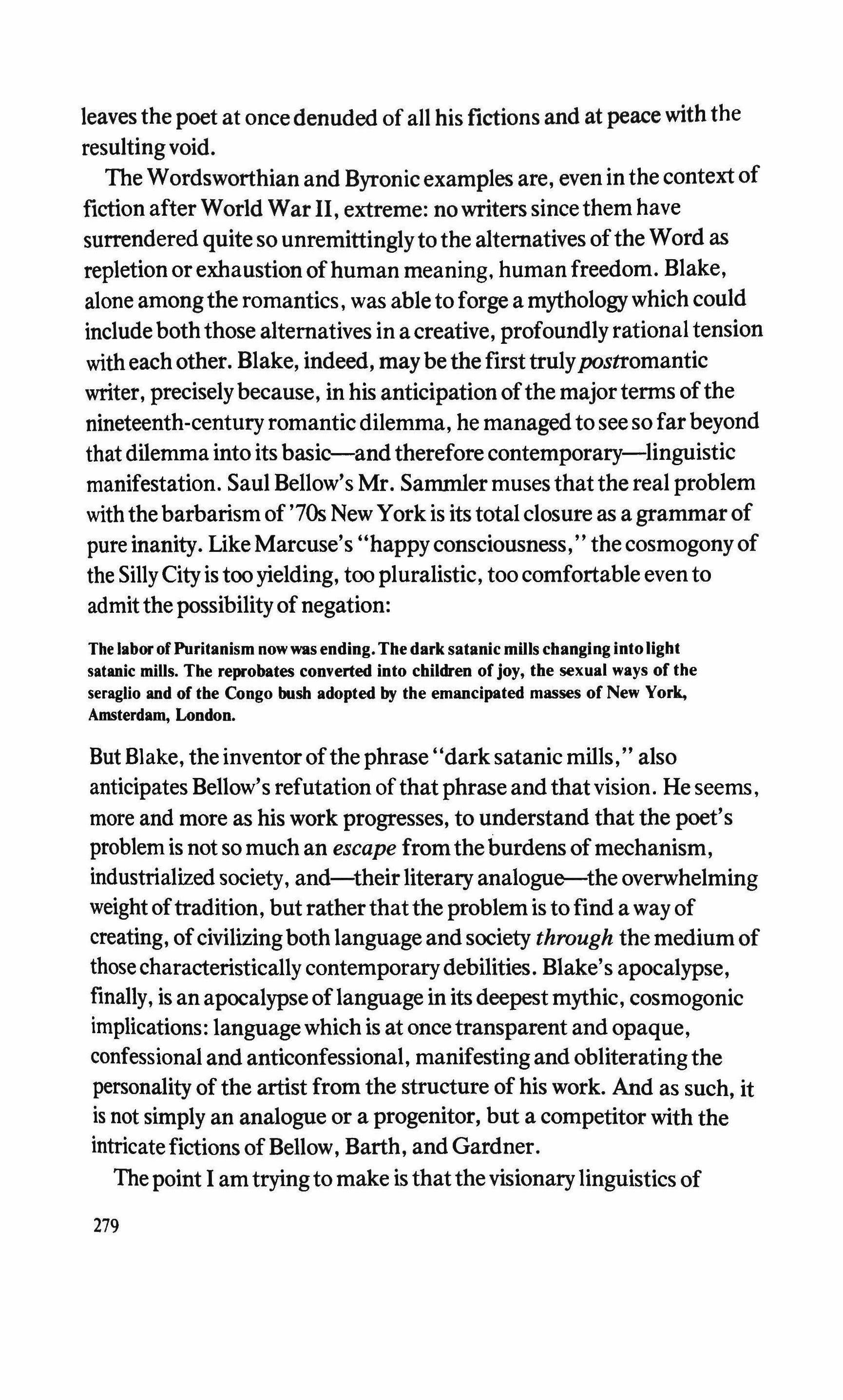
leaves the poet at once denuded of all his fictions and at peace with the resultingvoid.
The Wordsworthian and Byronicexamples are, even in the context of fiction after World War II, extreme: no writers sincethem have surrendered quite so unremittinglyto the alternatives ofthe Word as repletion or exhaustion ofhuman meaning. human freedom. Blake, alone amongthe romantics, was able to forge a mythologywhich could includeboththose alternatives in a creative, profoundly rational tension witheach other. Blake, indeed, maybe the first trulypostromantic writer, preciselybecause, in his anticipation ofthe major terms ofthe nineteenth-century romantic dilemma, he managed to see so farbeyond that dilemma into its basic-and therefore contemporary-linguistic manifestation. Saul Bellow's Mr. Sammler muses thatthe real problem withthebarbarism of '70s NewYork is its total closure as a grammar of pure inanity. Like Marcuse's "happyconsciousness, " the cosmogonyof the SillyCityis too yielding, too pluralistic, too comfortable even to admit thepossibilityofnegation:
The labor of Puritanism now was ending. The dark satanic mills changing into light satanic mills. The reprobates converted into children of joy, the sexual ways of the seraglio and of the Congo bush adopted by the emancipated masses of New York, AlIL'iterdam, London.
But Blake, the inventor ofthe phrase "dark satanic mills," also anticipates Bellow's refutation ofthat phrase and thatvision. He seems. more and more as his work progresses, to understand that the poet's problem is not so much an escape fromtheburdens ofmechanism, industrialized society, and-their literaryanalogue---theoverwhelming weight oftradition, but ratherthatthe problem is to find a way of creating, ofcivilizingboth language and society through the medium of thosecharacteristicallycontemporarydebilities. Blake's apocalypse, finally, is an apocalypseoflanguage in its deepestmythic, cosmogonic implications: languagewhich is at once transparent and opaque, confessional and anticonfessional, manifesting and obliteratingthe personality of the artist from the structure of his work. And as such, it is not simply an analogue or a progenitor, but a competitor with the intricatefictions ofBellow, Barth, and Gardner.
Thepoint I am tryingto make is that thevisionarylinguistics of
279
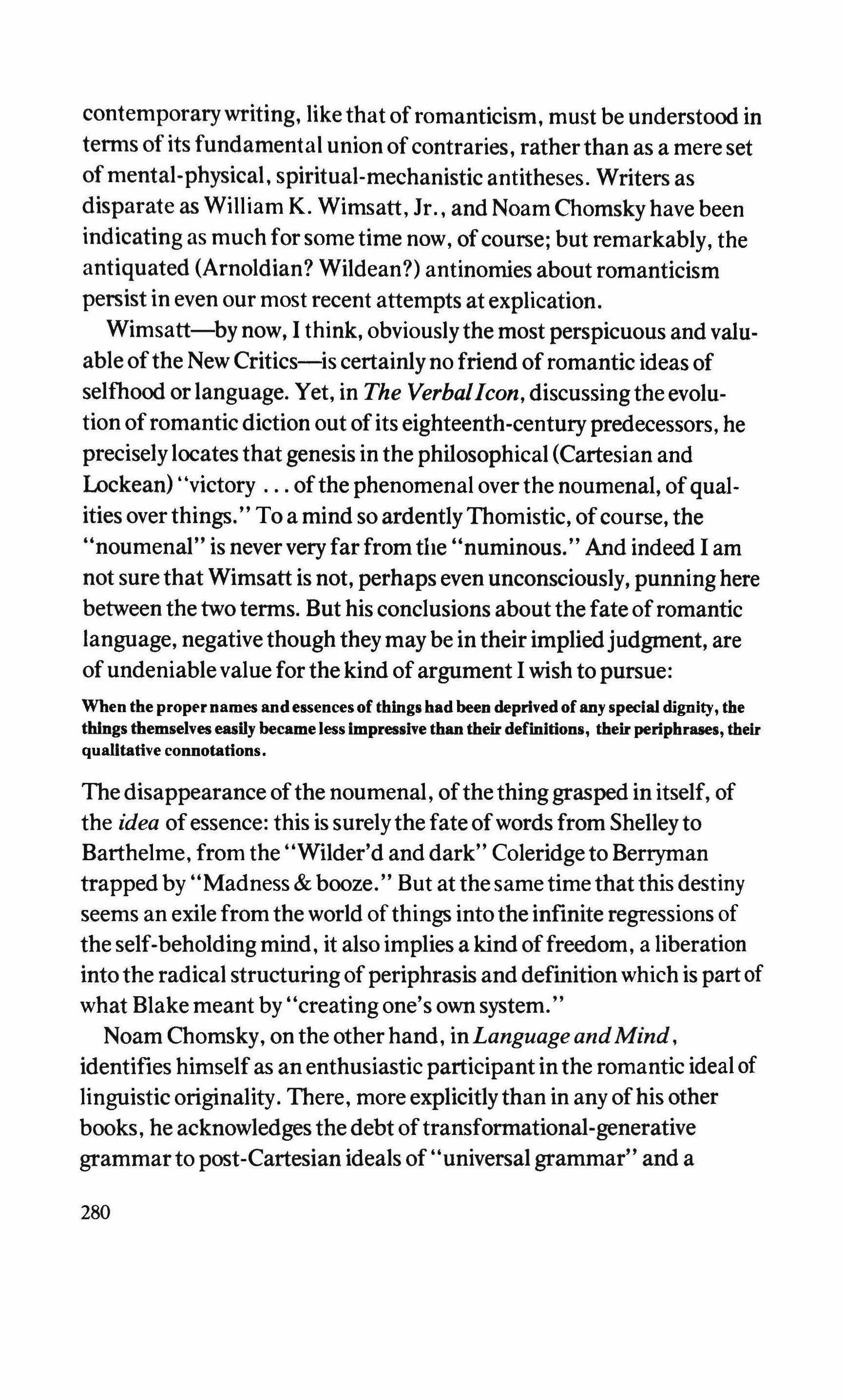
contemporarywriting, like that ofromanticism, must be understood in terms ofits fundamental union of contraries, ratherthan as a mere set ofmental-physical, spiritual-mechanistic antitheses. Writers as disparate as William K. Wimsatt, Jr., and Noam Chomsky have been indicating as much for some time now, ofcourse; but remarkably, the antiquated (Arnoldian? Wildean?) antinomies about romanticism persist in even our most recent attempts at explication.
Wimsatt-by now, I think, obviouslythe most perspicuous and valuable ofthe New Critics-is certainly no friend ofromantic ideas of selfhood or language. Yet, in The VerbalIcon, discussingthe evolution ofromantic diction out ofits eighteenth-centurypredecessors, he preciselylocates that genesis in the philosophical (Cartesian and Lockean) "victory ofthe phenomenal over the noumenal, ofqualities over things." To a mind so ardentlyThomistic, ofcourse, the "noumenal" is never very far from the "numinous." And indeed I am not sure that Wimsatt is not, perhaps even unconsciously, punning here between the two terms. But his conclusions aboutthe fate ofromantic language, negativethoughthey may be in their impliedjudgment, are of undeniablevalue for the kind of argument I wish to pursue:
When the proper names and essences of things had been deprived of any special dignity, the things themselves easUy became less impressive than their definitions, their periphrases, their qualitative connotations.
The disappearance ofthe noumenal, ofthethinggrasped in itself, of the idea of essence: this is surelythe fateofwords from Shelley to Barthelme, from the "Wilder'd and dark" Coleridge to Berryman trappedby "Madness & booze." But at the same timethatthis destiny seems an exile from the world ofthings intothe infinite regressions of the self-beholdingmind, it also implies a kind offreedom, a liberation intothe radical structuringofperiphrasis and definition which is partof what Blake meant by"creating one's own system."
Noam Chomsky, on the other hand, inLanguageandMind, identifies himself as an enthusiastic participant inthe romantic ideal of linguistic originality. There, more explicitly than in any ofhis other books, he acknowledges the debt oftransformational-generative grammarto post-Cartesian ideals of "universal grammar" and a
280
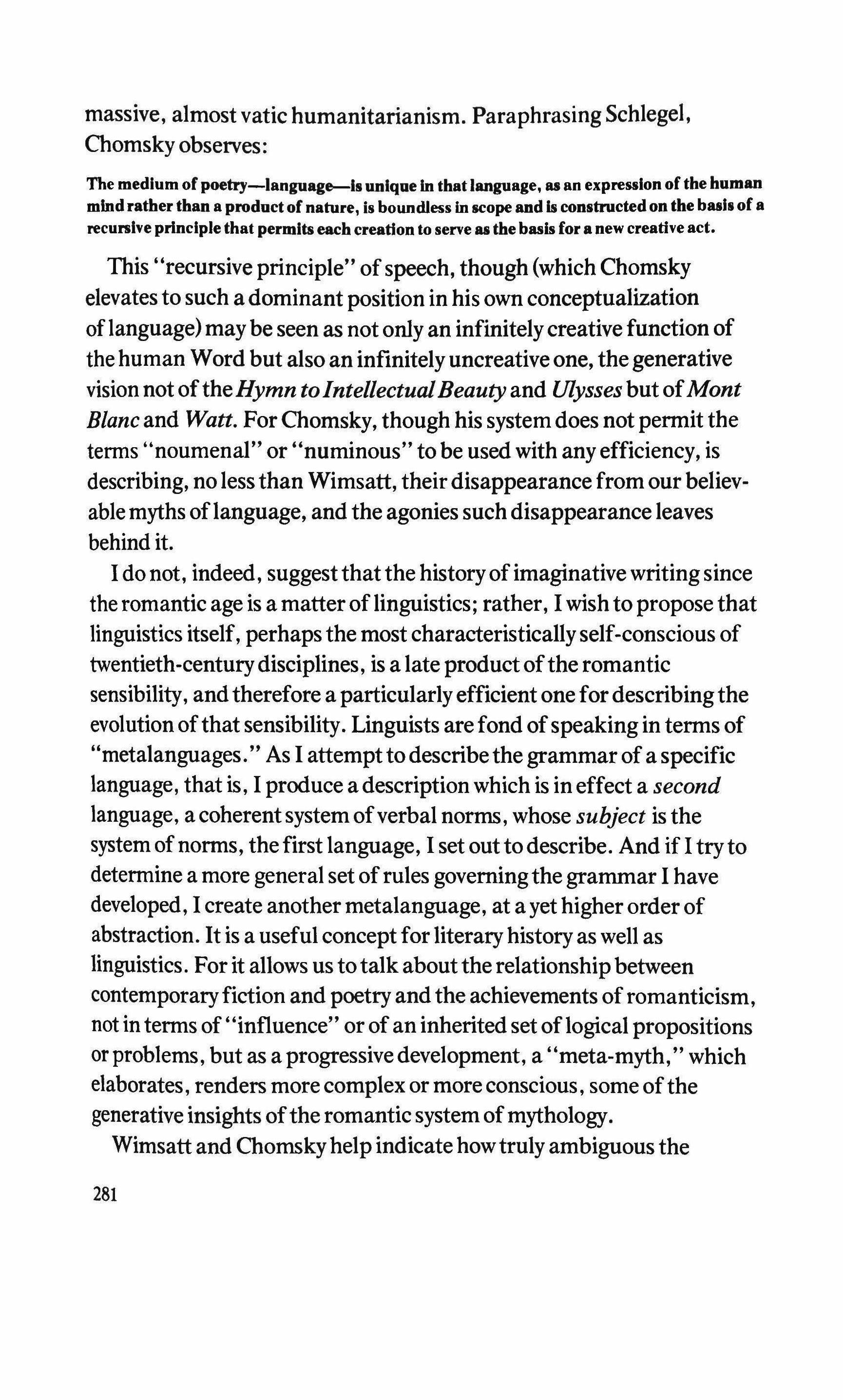
massive, almost vatic humanitarianism. ParaphrasingSchlegel, Chomsky observes:
The medium ofpoetry-language-Is unique In thatlanguage, as an expression ofthe human mindrather than a product of nature, is boundless In scope and Is constructed on the basis of a recunlve principle that permits each creation to serve as the basis for a new creative act.
This "recursive principle" of speech, though (which Chomsky elevates to such a dominant position in his own conceptualization oflanguage) may be seen as not only an infinitely creative function of the human Word but also an infinitelyuncreative one, thegenerative vision not oftheHymn toIntellectualBeauty and Ulyssesbut ofMont Blanc and Watt. For Chomsky, though his system does not permit the terms "noumenal" or "numinous" to be used with any efficiency, is describing, no lessthan Wimsatt, their disappearance from our believable myths oflanguage, and the agonies such disappearance leaves behind it.
I donot, indeed, suggestthatthe historyofimaginativewritingsince the romantic age is a matter oflinguistics; rather, I wish to propose that linguistics itself, perhaps the most characteristicallyself-conscious of twentieth-centurydisciplines, is a late productofthe romantic sensibility, and therefore a particularly efficient one fordescribingthe evolution ofthat sensibility. Linguists are fond ofspeaking in terms of "metalanguages." As I attempt to describethe grammar of a specific language, that is, I produce a description which is in effect a second language, a coherent system ofverbal norms, whose subject is the system of norms, thefirst language, I set out to describe. And if I try to determine a more general set ofrules governingthe grammar I have developed, I create another metalanguage, at a yethigher order of abstraction. It is a useful concept for literaryhistory as well as linguistics. Forit allows us totalk aboutthe relationshipbetween contemporaryfiction and poetry andthe achievements of romanticism, not in terms of"influence" or of an inherited set oflogicalpropositions or problems, but as a progressivedevelopment, a "meta-myth," which elaborates, renders more complex or more conscious, some ofthe generativeinsights ofthe romantic system ofmythology. Wimsatt and Chomskyhelp indicate howtrulyambiguous the
281
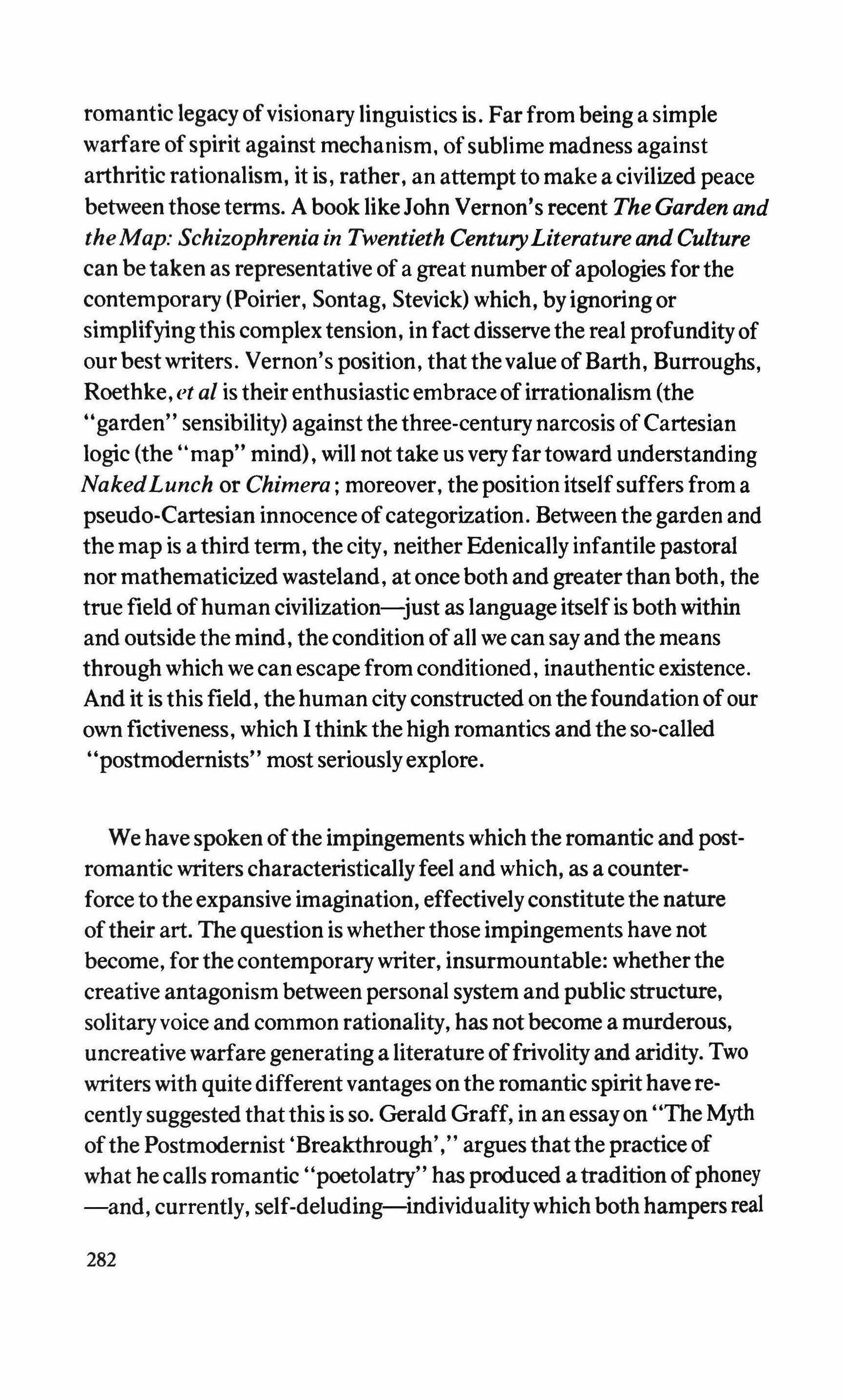
romantic legacyofvisionarylinguistics is. Far from being a simple warfare ofspirit against mechanism, ofsublime madness against arthritic rationalism, it is, rather, an attempt to make a civilized peace between those terms. A book likeJohn Vernon's recent The Garden and theMap: Schizophrenia in Twentieth CenturyLiterature and Culture can be taken as representative of a great number ofapologies forthe contemporary (Poirier, Sontag, Stevick) which, byignoring or simplifying this complextension, in fact disserve the real profundityof our bestwriters. Vernon's position, that thevalue ofBarth, Burroughs, Roethke, et at is theirenthusiastic embrace ofirrationalism (the "garden" sensibility) against the three-century narcosis ofCartesian logic (the "map" mind), will nottake us veryfartoward understanding NakedLunch or Chimera; moreover, the position itselfsuffers from a pseudo-Cartesian innocence ofcategorization. Between the garden and the map is a third term, the city, neither Edenically infantile pastoral nor mathematicized wasteland, at once both and greaterthan both, the true field ofhuman civilization-just as language itselfis both within and outside the mind, thecondition ofall we can say and the means through which we can escape from conditioned, inauthentic existence. And it is this field, the human city constructed on thefoundation of our own fictiveness, which I think the high romantics and the so-called "postmodernists" most seriouslyexplore.
We have spoken ofthe impingements which the romantic and postromantic writers characteristicallyfeel and which, as a counterforce to theexpansive imagination, effectively constitute the nature oftheir art. The question is whetherthose impingements have not become, forthe contemporary writer, insurmountable: whether the creative antagonism between personal system and public structure, solitary voice and common rationality, has not become a murderous, uncreative warfare generating a literature offrivolity and aridity. Two writers with quite different vantages on the romantic spirit have recentlysuggested thatthis is so. Gerald Graff, in an essay on "The Myth ofthe Postmodernist 'Breakthrough'," argues thatthe practice of what he calls romantic "poetolatry" has produced a tradition ofphoney -and, currently, self-deluding-individuality which both hampersreal
282
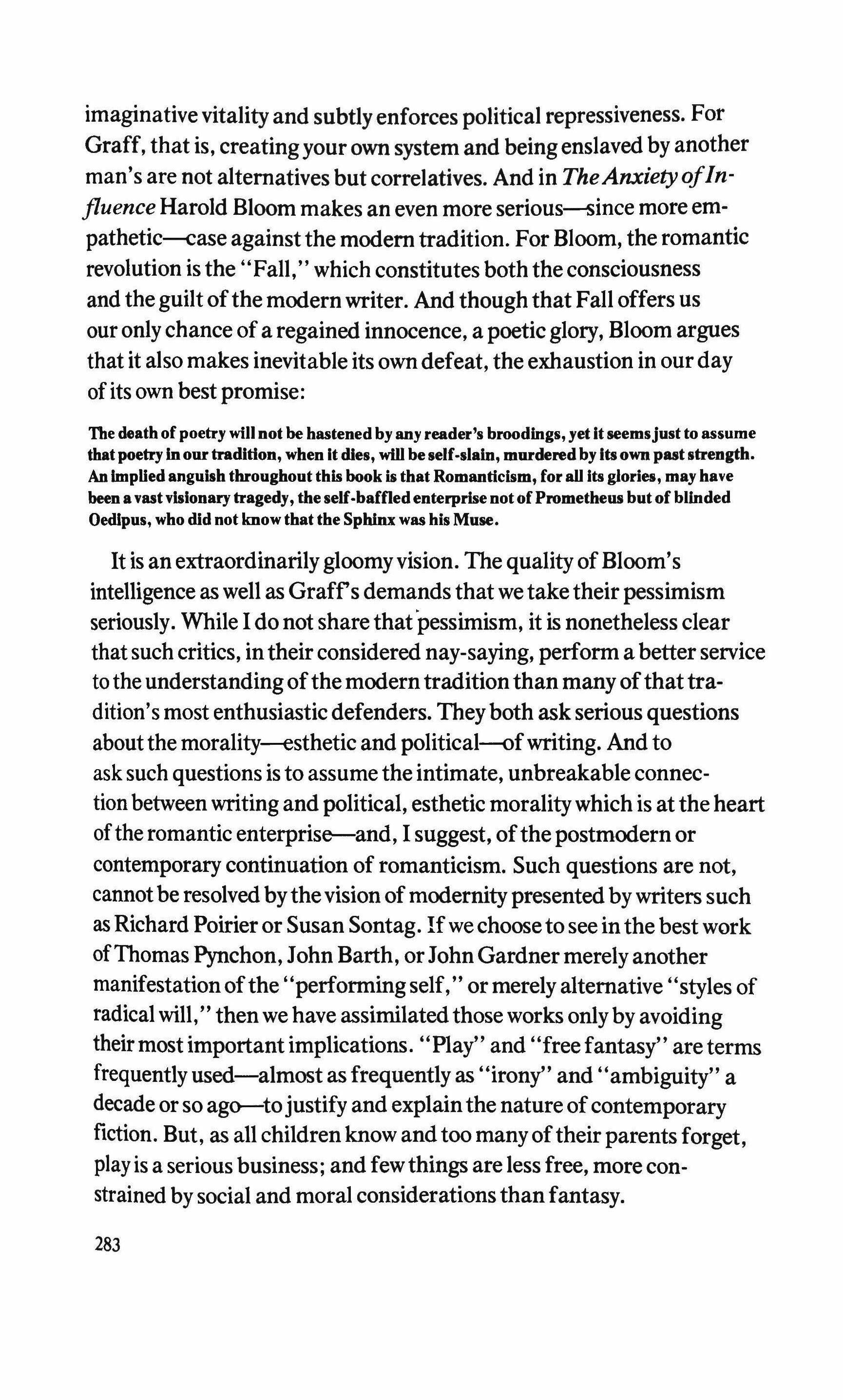
imaginativevitality and subtlyenforces political repressiveness. For Graff, that is, creatingyour own system and beingenslaved by another man's are not alternatives but correlatives. And in TheAnxietyofInfluence Harold Bloom makes an even more serious=-since more empathetic---caseagainstthe modern tradition. For Bloom, the romantic revolution is the"Fall," which constitutes both the consciousness and theguilt ofthe modern writer. And though that Fall offers us our only chance of a regained innocence, a poeticglory, Bloom argues that it also makes inevitable its own defeat, the exhaustion in our day ofits own best promise:
The death ofpoetry will not be hastened by any reader's broodlngs,yet it seemsjust to assume that poetry in our tradition, when It dies, will be self-slaln, murderedby Its own past strength. An ImpUedanguishthroughout this book is that Romanticism, for all its glories, may have been a vast visionary tragedy, the self-baffledenterprise not of Prometheus butof bUnded Oedipus, who did not know that the Sphinx was his Muse.
It is an extraordinarilygloomyvision. The quality ofBloom's intelligence as well as Graffs demands that we take their pessimism seriously. While I do not share thatpessimism, it is nonetheless clear that such critics, intheir considered nay-saying, perform a better service to the understandingofthe moderntraditionthan manyofthat tradition's most enthusiastic defenders. Theyboth ask serious questions aboutthe morality-esthetic and political-ofwriting. And to ask such questions is to assume the intimate, unbreakable connection between writing and political, esthetic morality which is at the heart ofthe romantic enterprise-and, I suggest, ofthe postmodern or contemporary continuation of romanticism. Such questions are not, cannot be resolved bythevision ofmodernitypresentedbywriters such as Richard Poirier or Susan Sontag. If we chooseto see inthe best work ofThomas Pynchon, John Barth, or John Gardner merelyanother manifestationofthe''performingself," or merely alternative''styles of radical will," then we have assimilatedthose works onlybyavoiding their most importantimplications. "Play" and "free fantasy" are terms frequently used-almost as frequently as "irony" and "ambiguity" a decade or so ago-tojustify and explainthe nature ofcontemporary fiction. But, as all children know and too manyoftheir parents forget, playis a serious business; and fewthings are less free, more constrained by social and moral considerationsthan fantasy.
283
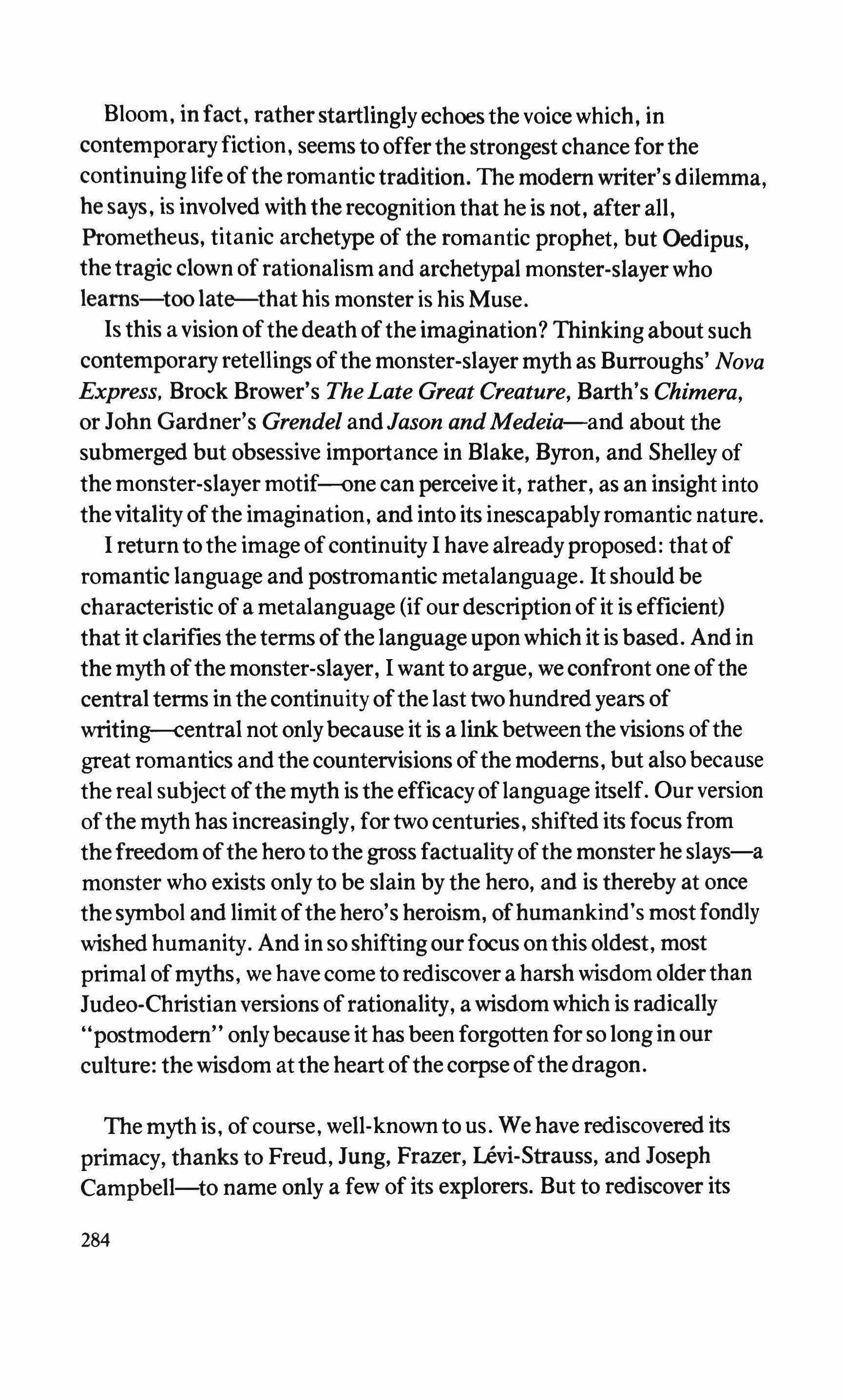
Bloom, in fact, ratherstartlingly echoes the voice which, in contemporaryfiction, seems to offer the strongest chance forthe continuing life ofthe romantic tradition. The modern writer's dilemma, he says, is involved with the recognition that he is not, after all, Prometheus, titanic archetype of the romantic prophet, but Oedipus, thetragic clown ofrationalism and archetypal monster-slayer who learns-too late--that his monster is his Muse.
Is this a vision ofthe death ofthe imagination? Thinking about such contemporaryretellings ofthe monster-slayermyth as Burroughs' Nova Express, Brock Brower's TheLate Great Creature, Barth's Chimera, or John Gardner's Grendel andJason andMedeia-and about the submerged but obsessive importance in Blake, Byron, and Shelley of the monster-slayer motif-one can perceive it, rather, as an insight into thevitality ofthe imagination, and into its inescapablyromantic nature. I return to the image ofcontinuity I have alreadyproposed: that of romantic language and postromantic metalanguage. It should be characteristic of a metalanguage (if our description ofit is efficient) that it clarifies the terms ofthe language upon which it is based. And in the myth ofthe monster-slayer, I want to argue, we confront one ofthe central terms in the continuity ofthe last two hundred years of writing--central not onlybecause it is a linkbetween the visions ofthe great romantics and the countervisions ofthe moderns, but also because the real subject ofthe myth is the efficacy oflanguage itself. Our version ofthe myth has increasingly, for two centuries, shifted its focus from thefreedom ofthe hero to the gross factuality ofthe monster he slays-a monster who exists only to be slain by the hero, and is thereby at once the symbol and limit ofthe hero's heroism, ofhumankind's most fondly wished humanity. And in so shifting our focus on this oldest, most primal ofmyths, we have come to rediscover a harsh wisdom olderthan Judeo-Christianversions ofrationality, a wisdomwhich is radically "postmodern" onlybecause it has been forgotten for so longin our culture: the wisdom at the heart ofthecorpse ofthe dragon.
The myth is, of course, well-known to us. We have rediscovered its primacy, thanks to Freud, Jung, Frazer, Levi-Strauss, and Joseph Campbell-to name only a few of its explorers. But to rediscover its
284
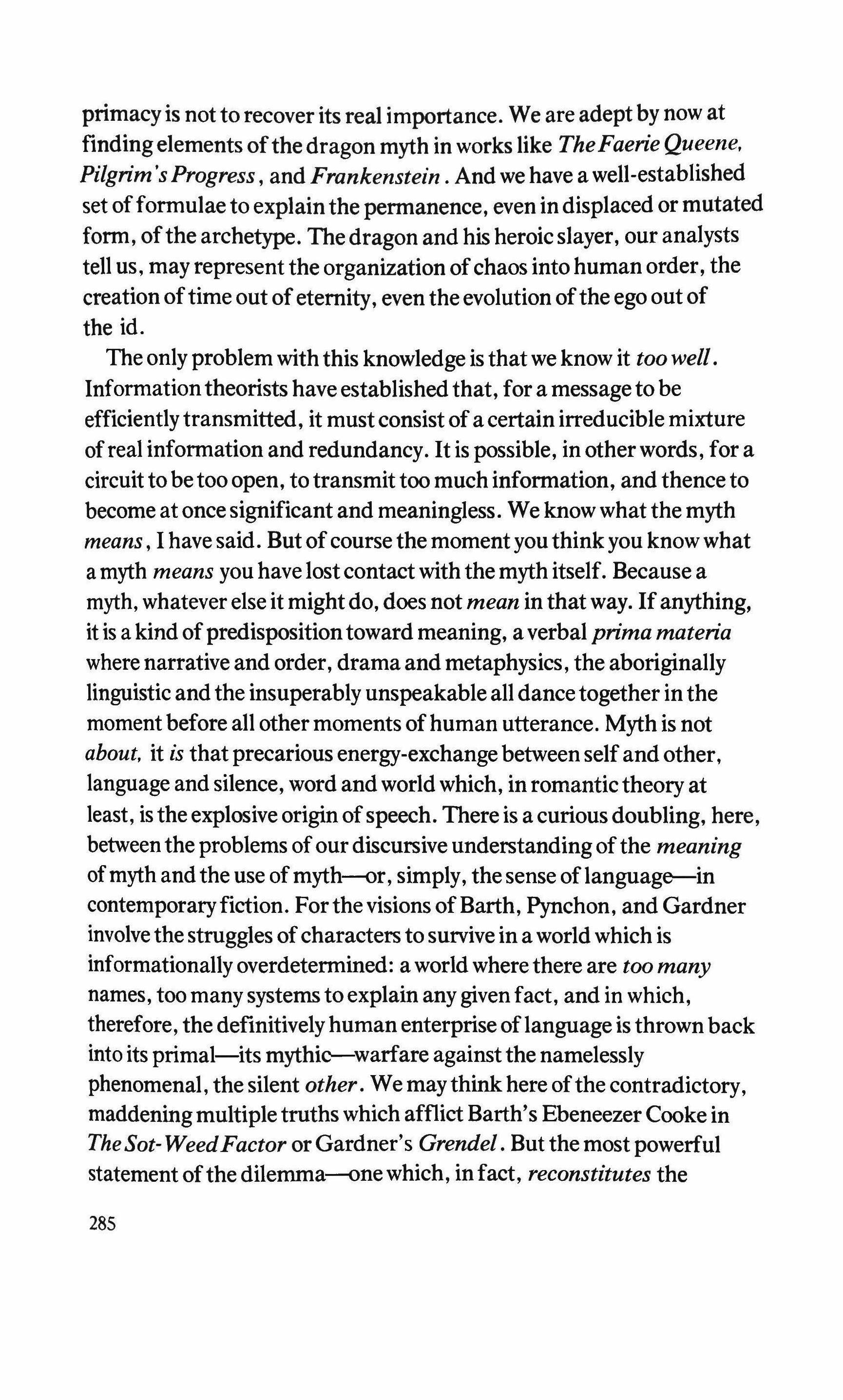
primacyis not to recover its real importance. We are adeptby now at findingelements ofthe dragonmyth in works like TheFaerie Queene. Pilgrim'sProgress, and Frankenstein. And we have a well-established set offormulae to explain the permanence, even in displaced or mutated form, ofthe archetype. The dragon and his heroicslayer, our analysts tell us, may represent the organization ofchaos into human order, the creation oftime out ofeternity, even theevolution ofthe ego out of the id.
The onlyproblem with this knowledge is that we know it too well. Informationtheorists have establishedthat, for a message to be efficientlytransmitted, it must consist of a certain irreducible mixture ofreal information and redundancy. It is possible, in other words, for a circuit to be too open, to transmit too much information, and thence to become at once significant and meaningless. We knowwhat the myth means, I have said. But of course the moment you think you know what a myth means you have lost contact with the myth itself. Because a myth, whatever else it mightdo, does not mean in that way. Ifanything, itis a kind ofpredispositiontoward meaning, a verbal prima materia where narrative and order, drama and metaphysics, the aboriginally linguistic and the insuperablyunspeakableall dance together in the moment before all other moments ofhuman utterance. Myth is not about. it is that precariousenergy-exchange between selfand other, language and silence, word and world which, in romantic theory at least, is the explosiveorigin ofspeech. There is a curious doubling. here, betweenthe problems of our discursive understanding ofthe meaning ofmyth andthe use ofmyth-or, simply, the sense oflanguage-sin contemporaryfiction. Forthevisions of Barth, Pynchon, and Gardner involve the struggles ofcharacters to survivein a world which is informationallyoverdetermined: a world where there are too many names, too many systems to explain any givenfact, and in which, therefore, the definitively human enterprise oflanguage is thrown back into its primal-its mythic--warfare againstthe namelessly phenomenal, the silent other. We may think here ofthe contradictory, maddeningmultiple truths which afflict Barth's Ebeneezer Cooke in TheSot- WeedFactor or Gardner's Grendel. But the most powerful statement ofthe dilemma-one which, in fact, reconstitutes the 285
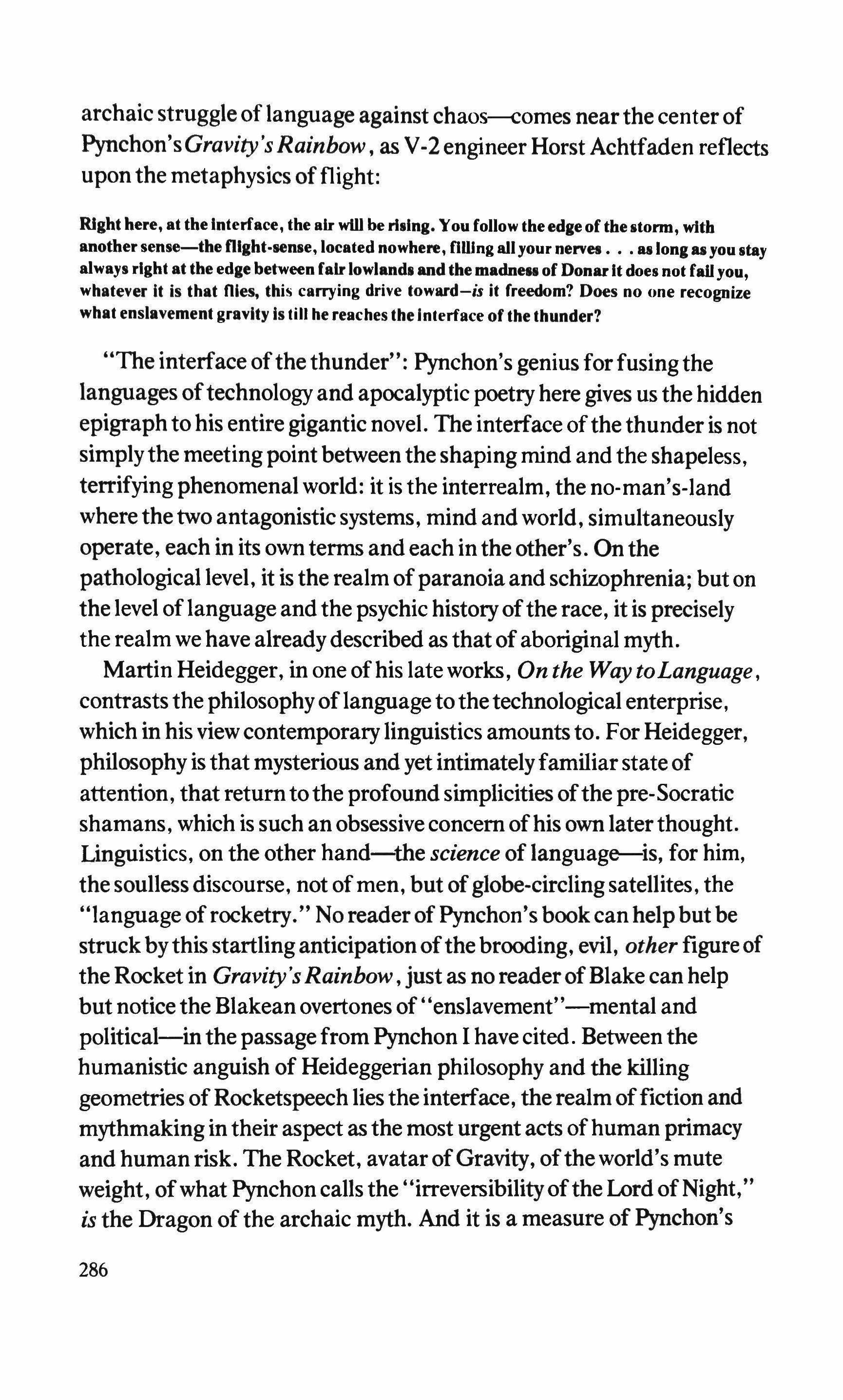
archaic struggle of language against chaos=-comes near the center of Pynchon'sGravity'sRainbow, as V-2 engineer Horst Achtfaden reflects upon the metaphysics offlight:
Right here, at the Interface, the air wUl be riling. You follow the edge of the storm, with another sense-the flIght.seme, located nowhere, flUlng all your nerves as long as you stay always right at the edge between fair lowlands and the madnen of Donar It does not fall you, whatever It is that flies, this carrying drive toward-is it freedom? Does no one recognize what enslavement gravity Is till he reaches the Interface of the thunder?
"The interface ofthe thunder": Pynchon's genius forfusingthe languages oftechnology and apocalyptic poetry here gives us the hidden epigraph to his entire gigantic novel. The interface ofthe thunder is not simplythe meetingpoint between the shaping mind and the shapeless, terrifyingphenomenal world: it is the interrealm, the no-man's-land where the two antagonisticsystems, mind and world, simultaneously operate, each in its own terms and each in the other's. On the pathological level, it is the realm ofparanoiaand schizophrenia; but on the level oflanguage and the psychic historyofthe race, it is precisely the realm we have alreadydescribed as that ofaboriginal myth.
Martin Heidegger, in one ofhis late works, On the Way toLanguage, contrasts the philosophyoflanguage to thetechnologicalenterprise, which in his viewcontemporarylinguistics amounts to. For Heidegger, philosophy is that mysterious and yetintimatelyfamiliar state of attention, that return tothe profoundsimplicities ofthe pre-Socratic shamans, which is such an obsessive concern ofhis own laterthought. Linguistics, on the other hand-the science of language-is, for him, the soulless discourse, not of men, but ofglobe-circlingsatellites, the "language of rocketry." No readerof Pynchon's book can helpbut be struckbythis startlinganticipation ofthebrooding, evil, other figureof the Rocket in Gravity'sRainbow,just as no readerofBlake can help but notice the Blakean overtones of''enslavement" -mental and political-in the passage from Pynchon I have cited. Between the humanistic anguish of Heideggerian philosophy and the killing geometries ofRocketspeech lies the interface, the realm offiction and mythmaking in their aspect as the most urgent acts ofhuman primacy and human risk. The Rocket, avatar ofGravity, oftheworld's mute weight, ofwhat Pynchon calls the''irreversibility ofthe Lord ofNight," is the Dragon of the archaic myth. And it is a measure of Pynchon's
286
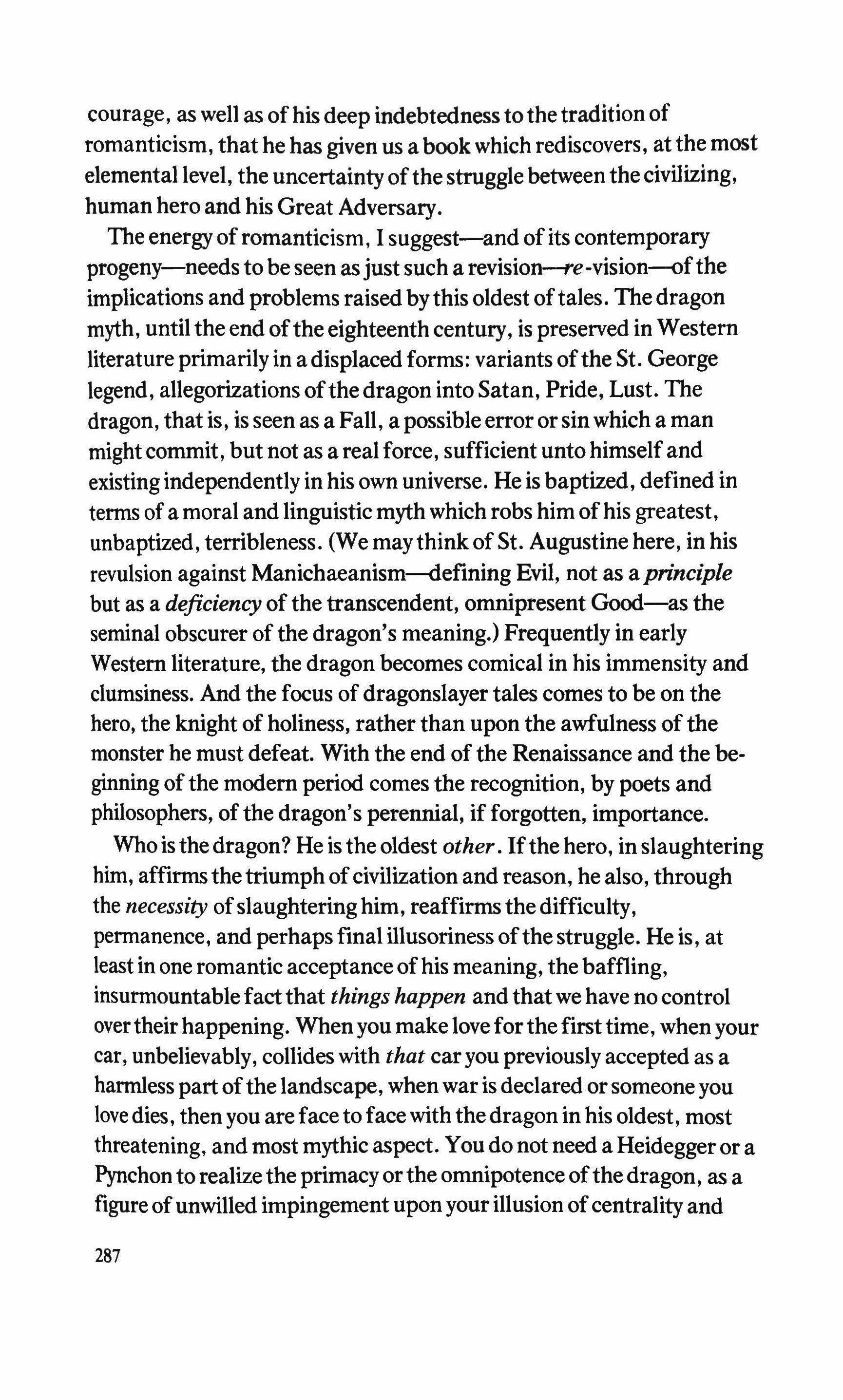
courage, as well as of his deep indebtedness to the tradition of romanticism, that he has given us a book which rediscovers, at the most elemental level, the uncertainty ofthe struggle between the civilizing, human hero and his Great Adversary.
The energy ofromanticism, I suggest-and ofits contemporary progeny-needs to be seen as just such a revision-re-vision--ofthe implications and problems raised bythis oldest oftales. The dragon myth, until the end oftheeighteenth century, is preserved in Western literature primarily in a displaced forms: variants ofthe St. George legend, allegorizations ofthedragon into Satan, Pride, Lust. The dragon, that is, is seen as a Fall, a possible error or sinwhich a man mightcommit, but not as a real force, sufficient unto himself and existingindependently in his own universe. He is baptized, defined in terms of a moral and linguistic myth which robs him ofhis greatest, unbaptized, terribleness. (We may think ofSt. Augustine here, in his revulsion against Manichaeanism-defining Evil, not as a principle but as a deficiency ofthe transcendent, omnipresent Good-as the seminal obscurer of the dragon's meaning.) Frequently in early Western literature, the dragon becomes comical in his immensity and clumsiness. And the focus of dragonslayer tales comes to be on the hero, the knight of holiness, rather than upon the awfulness of the monster he must defeat. With the end of the Renaissance and the beginning ofthe modern period comes the recognition, by poets and philosophers, ofthe dragon's perennial, if forgotten, importance. Whoisthedragon? He is the oldest other. Ifthe hero, in slaughtering him, affirmsthetriumph ofcivilization and reason, he also, through the necessity ofslaughteringhim, reaffirms thedifficulty, permanence, and perhaps final illusoriness ofthe struggle. He is, at least in one romantic acceptance ofhis meaning, thebaffling, insurmountablefactthat things happen and that we have no control over their happening. When you make loveforthefirst time, when your car, unbelievably, collides with that car you previouslyaccepted as a harmless part ofthe landscape, when war is declared or someone you lovedies, then you are face to facewith thedragon in his oldest, most threatening, and most mythic aspect. You do not need a Heidegger or a Pynchon to realizethe primacy or the omnipotence ofthedragon, as a figureofunwilled impingement upon your illusion ofcentrality and
287

control. And yet. at least in the history of Western thought, it apparentlytook the romantic movement to rediscover that impingement. Or. at least. it tookthe romantics to create the myth of that impingement in its distinctively modern sense. Literary eras are distinguished. not so much by their solutions to existence as bythe varieties ofexistential malaise they discover-a new headache for every age. And with the romantics. the lineaments ofthe monsters of antiquity and the Renaissance take on the shape of our nightmares. Legions ofcritics and commentators have argued about the "meaning" of the figure Demogorgon from Shelley's Prometheus Unbound. But surely Demogorgon is-like Blake's monster Urizen or Coleridge'S seductive vampire Christabel-the consciousness that we are here, things are there, and they happen to us. Sexual awakening (for Coleridge). the imprisonment ofthe mind in a self-limitingsystem (for Blake). or the inhumandynamics ofcosmic history (for Shelley) are all manifestations ofthe dragon, ofthe immortalityofthe monstrous, and-most shatteringly-of the perishability of human names and human explanations in confrontation with that monstrosity.
Great civilizations-though not, until the romantics, our own-have been constructed uponthe basis ofthis inhospitablemythology ofthe dragon; and to these we might turn to comprehend our own most civilizing fabrications. One ofthe oldest tales inthe world is the Babyloniancreation-epic, the EnumaElish. It tells how the primal dragon-goddess Tiamat creates the Babylonianpantheon and how the gods and goddesses ofthe pantheon rebel againsttheir tyrannical mother. They send Marduk, their strongest and best. to fightagainst her. Marduk slays her and creates, out ofher corpse, the world of men and beasts as well as the new heaven ofthe gods. As he returns to the other gods from his labor ofdestruction and creation, they-and the first men he hasjustcreated=-sing a litany to his beauty. power, and terror.
The EnumaElish is one ofthe eeriest tales we have, since its latent subject is the origin ofwriting--theorigin, in a way. ofitself-out of inarticulate nothingness. As few laterversions ofthedragonmyth can afford to, ittakes the primacyofthe dragonseriously. Tiamat's preparations forthebattle with Marduk are the revelation, in fact, ofall
288
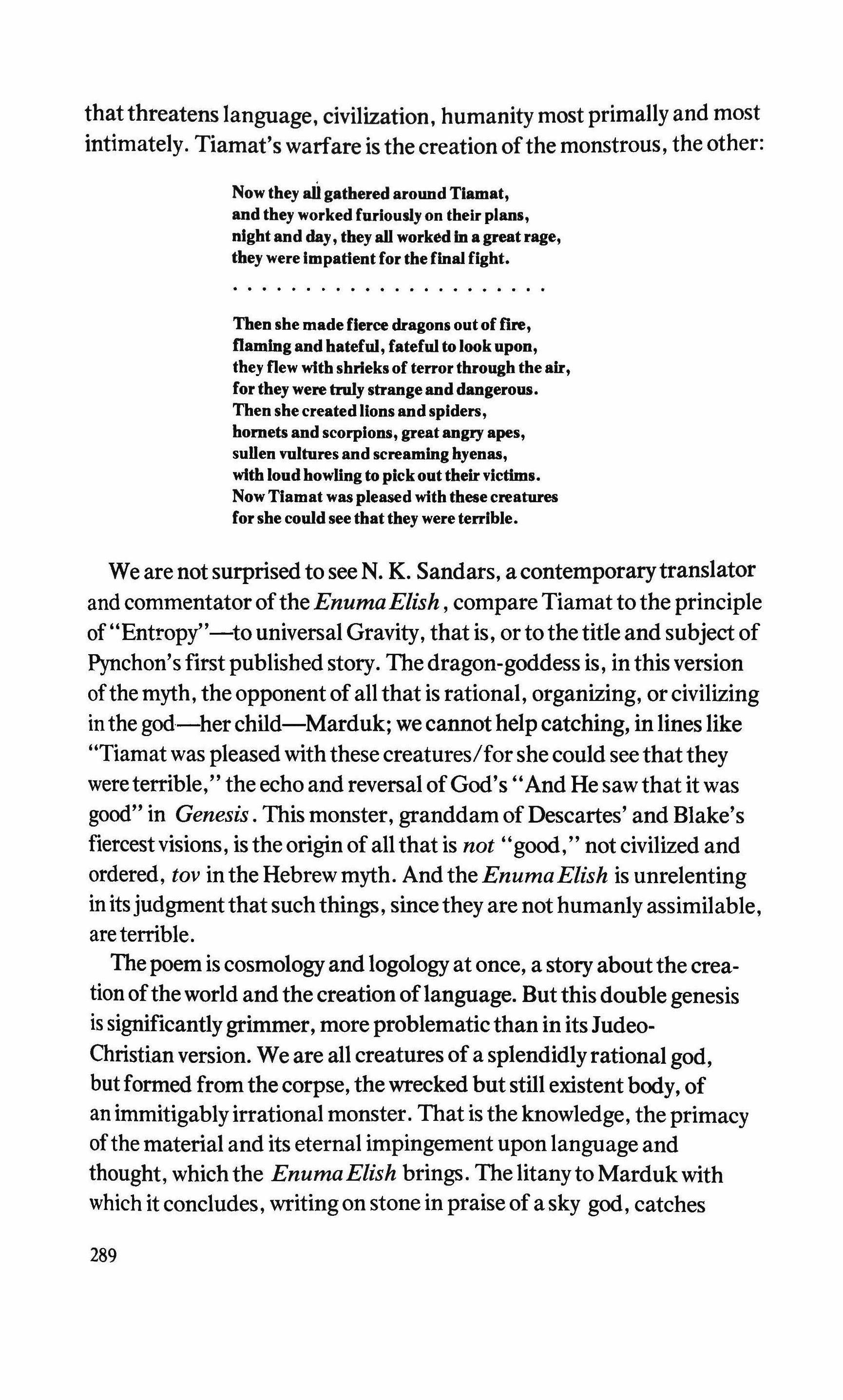
thatthreatens language, civilization, humanity most primally and most intimately. Tiamat's warfare is the creation ofthe monstrous, the other:
Now they aligathered around Tlamat, and they worked furiously on their plans, night and day, they aU worked In a great rage, they were Impatient for the final fight.
Then she made fierce dragons out of fire, flaming and hateful, fateful to look upon, they flew with shrieks of terror through the air, forthey were trulystrangeanddangerous. Then she created lions and spiders, hornets and scorpions, great angry apes, sullen vultures and screaminghyenas, with loud howling to pick out their victims. Now Tlamat was pleased with these creatures for she could see thatthey were terrible.
We are not surprised to see N. K. Sandars, a contemporarytranslator and commentator ofthe EnumaElish, compare Tiamat to the principle of"Entropy" -to universal Gravity, that is, or to the title and subject of Pynchon's first published story. The dragon-goddess is, in this version ofthe myth, the opponent of all that is rational, organizing, or civilizing inthe god-herchild-Marduk; we cannot helpcatching, in lines like "Tiamat was pleased withthese creatures/forshe could see thatthey were terrible," the echo and reversal ofGod's"And He saw that it was good" in Genesis. This monster, granddam of Descartes' and Blake's fiercestvisions, is the origin of allthat is not "good," not civilized and ordered, tov in the Hebrew myth. And the EnumaElish is unrelenting in itsjudgmentthat suchthings, sincethey are not humanlyassimilable, are terrible.
Thepoem is cosmologyand logology at once, a story aboutthe creation ofthe world and the creation oflanguage. But this double genesis is significantlygrimmer, more problematic than in its JudeoChristian version. We are all creatures of a splendidlyrational god, butformed from the corpse, thewrecked butstill existent body, of an immitigablyirrational monster. That is the knowledge, the primacy ofthe material and its eternal impingement upon language and thought, whichthe EnumaElish brings. The litanyto Mardukwith which it concludes, writing on stone in praise of a sky god, catches
289
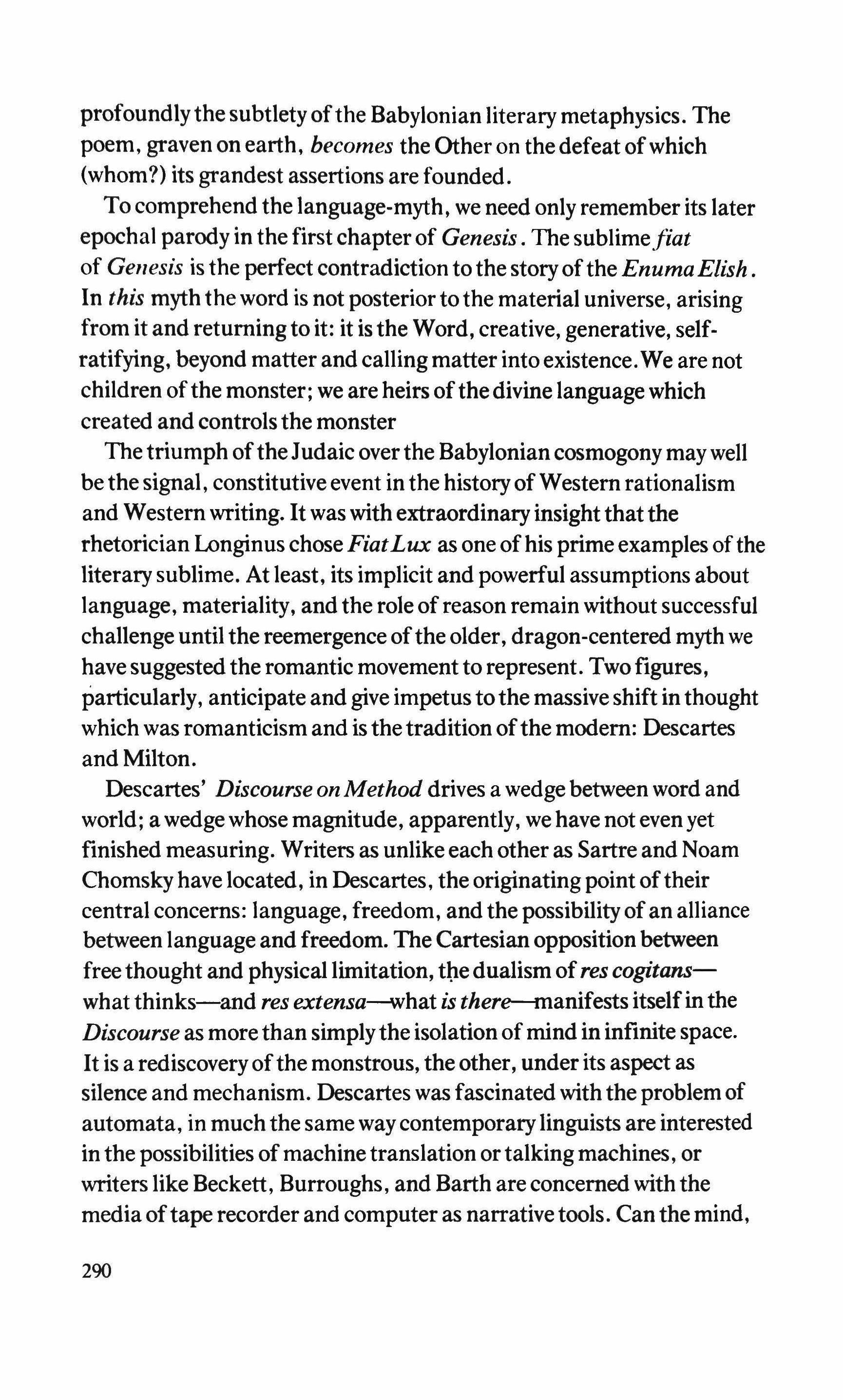
profoundlythe subtlety ofthe Babylonianliterary metaphysics. The poem, graven on earth, becomes the Other on the defeat ofwhich (whom?) its grandest assertions are founded.
To comprehend the language-myth, we need only remember its later epochal parody in the first chapter of Genesis. The sublimefiat of Genesis is the perfect contradiction to the storyofthe EnumaElish In this myth the word is not posterior to the material universe, arising from it and returning to it: it is the Word, creative, generative, selfratifying, beyond matter and calling matter into existence.We are not children ofthe monster; we are heirs ofthedivine language which created and controls the monster
The triumph oftheJudaic over the Babylonian cosmogony may well be the signal, constitutive event in the history ofWestern rationalism and Western writing. It was with extraordinaryinsight thatthe rhetorician Longinus chose FiatLux as one ofhis primeexamples ofthe literary sublime. At least, its implicit and powerful assumptions about language, materiality, and the role of reason remain without successful challenge until the reemergence ofthe older, dragon-centered myth we have suggested the romantic movement to represent. Twofigures, particularly, anticipate and giveimpetus tothe massive shift in thought which was romanticism and is thetradition ofthe modern: Descartes and Milton.
Descartes' Discourse on Method drives a wedge between word and world; a wedgewhose magnitude, apparently, we have not even yet finished measuring. Writers as unlike each other as Sartre and Noam Chomsky have located, in Descartes, the originatingpoint oftheir central concerns: language, freedom, and the possibility of an alliance between language and freedom. The Cartesian opposition between freethought and physical limitation, thedualism of res cogitanswhat thinks-and res extensa-what is there--rnanifests itselfin the Discourse as more than simplythe isolation of mind in infinite space. It is a rediscoveryofthe monstrous, theother, under its aspect as silence and mechanism. Descartes was fascinated with the problem of automata, in much the same way contemporarylinguists are interested in the possibilities ofmachine translation or talkingmachines, or writers like Beckett, Burroughs, and Barth are concerned with the media oftape recorder and computer as narrative tools. Can the mind,
290

operatingonly on its own certainties, construct an efficient replica of reality? Yes, answers the Discourse: and metaphysics has already become the supreme fiction of a counterplot to the divine creation. But Descartes goes farther. Can the mind, then, he asks, construct byitself a human being? Can it become God, finallybridgethe gulfbetween its aspirations and its involvement in the physical, the phenomenal, theother? No, answers Descartes: for, however convincing and accurate might be the automaton constructed by such a hypothetically omnipotent human mind, therobot would still lack thepower ofspeech, oflanguage, that God-given power which is the sure sign ofour humanity and of our ultimatedeliverance from the world of res extensa. Later writers and thinkers have had the sorry task ofdiscoveringjust howgratuitous Descartes' confidence really is. Butthe terms ofthe debate remain his. Language, after the Cartesian revolution, must be viewed as either our ultimate liberation from, or our ultimate bondage to, our own materiality.
So Milton, in ParadiseLost, makes the myth ofthe Fall a parable, among otherthings, ofhis own ferociously Christian confrontation with theterrors ofthe Cartesian universe. His primal serpent is at once the most heroic and most pitiable character in the epic, for he alone, of all the protagonists ofParadiseLost, wandersthrough an infinite Cartesian space. His exile and fall, in fact, are, precisely, his exile into that space-the space ofthe modern mind. Early in the poem, Satan utters what was to become, in many ways, the romantic manifesto of consciousness: "The mind is its own place." Butthat manifesto, as Milton knew and the romantics experienced, is an admission, finally, thatthemind cannot be any other place but its own-that the world of matter has resumed its original identity as threat and limit to the soul. Milton's Satan does not want to be the serpent. He wants to exist in the freedom ofhis own vitality; butthe poem will not let him, as the new physics ofMilton's and OUt era will not let us. Satan is exiled, in a sense, intothe world his rebellious Cartesian mind has created, just as Adam and Eve, who create historythroughtheir sin, are punished for their sin bybeingdriven from the prehistorical state intothe historythey have generated. ParadiseLost, in other words, is not only a poem about the Fall; it contains a recapitulation ofthe Fall in a more bitter-and more modern-formulation. Consciousness, fallen consciousness, is no
291
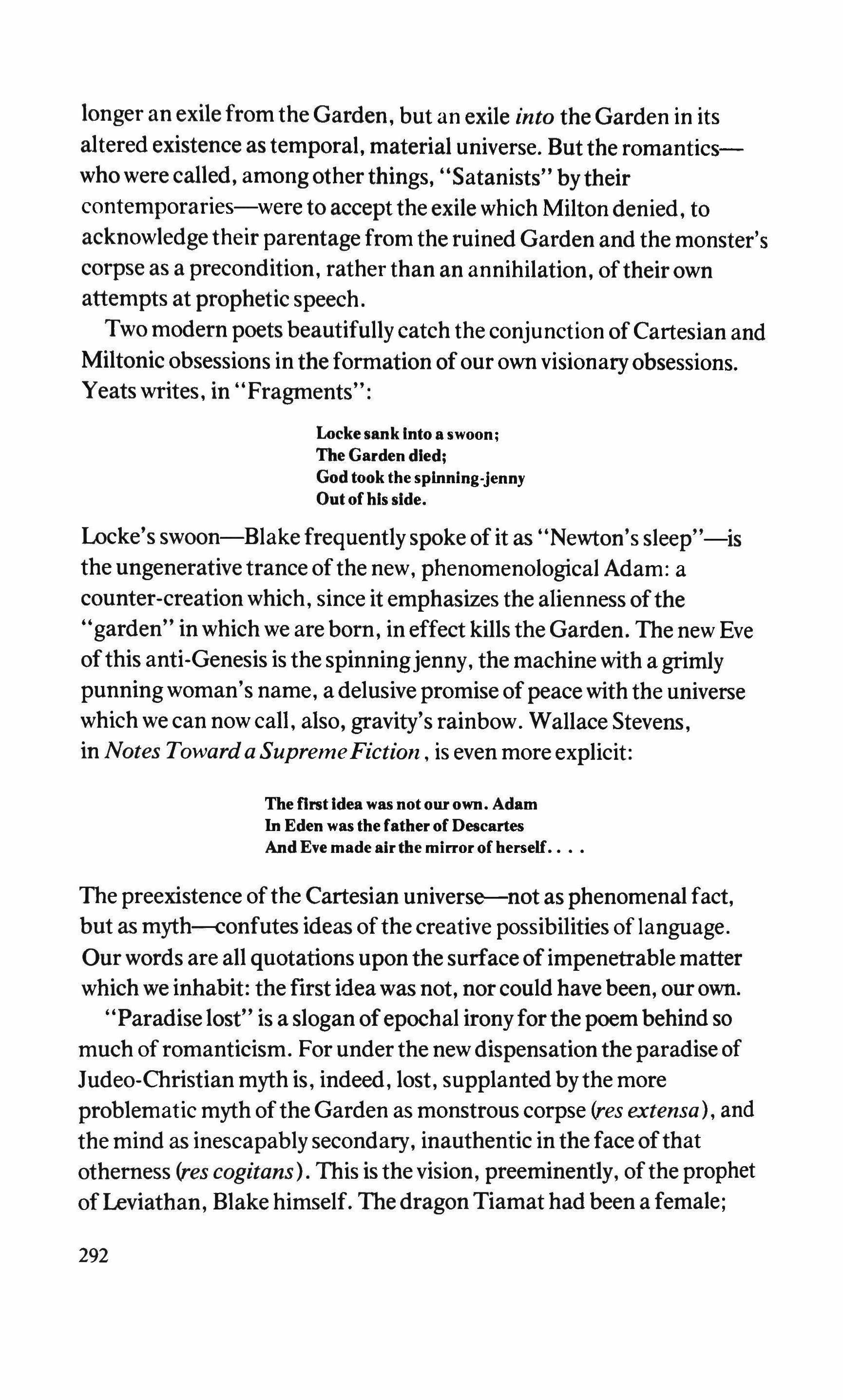
longer an exile from the Garden, but an exile into the Garden in its altered existence as temporal, material universe. But the romanticswho were called, among other things, "Satanists" bytheir contemporaries-were to acceptthe exile which Milton denied, to acknowledge their parentage from the ruined Garden and the monster's corpse as a precondition, rather than an annihilation, oftheir own attempts at prophetic speech.
Two modern poets beautifully catch the conjunction of Cartesian and Miltonic obsessions in the formation of our own visionaryobsessions. Yeats writes, in "Fragments":
Locke sank Into a swoon; The Garden died; God took the spinning-jenny Out ofhis side.
Locke's swoon-Blakefrequentlyspoke ofit as "Newton's sleep"-is the ungenerative trance ofthe new, phenomenological Adam: a counter-creation which, since it emphasizes the alienness ofthe "garden" in which we are born, in effect kills the Garden. The new Eve ofthis anti-Genesis is the spinningjenny, the machine with a grimly punning woman's name, a delusive promise ofpeace with the universe which we can now call, also, gravity's rainbow. Wallace Stevens, in Notes Toward a SupremeFiction, is even more explicit:
The orst idea was not our own. Adam In Eden was the father of Descartes And Eve made air the mirror ofherself
The preexistence ofthe Cartesian universe-not as phenomenal fact, but as myth-confutes ideas ofthe creative possibilities oflanguage. Our words are all quotations upon the surface ofimpenetrable matter which we inhabit: the first idea was not, nor could have been, our own.
"Paradise lost" is a slogan ofepochal ironyforthe poem behind so much of romanticism. For under the new dispensation the paradise of Judeo-Christian myth is, indeed, lost, supplantedbythe more problematic myth ofthe Garden as monstrous corpse (res extensa), and the mind as inescapablysecondary, inauthentic in the face ofthat otherness (res cogitans), This is thevision, preeminently, ofthe prophet ofLeviathan, Blake himself. The dragon Tiamat had been a female;
292
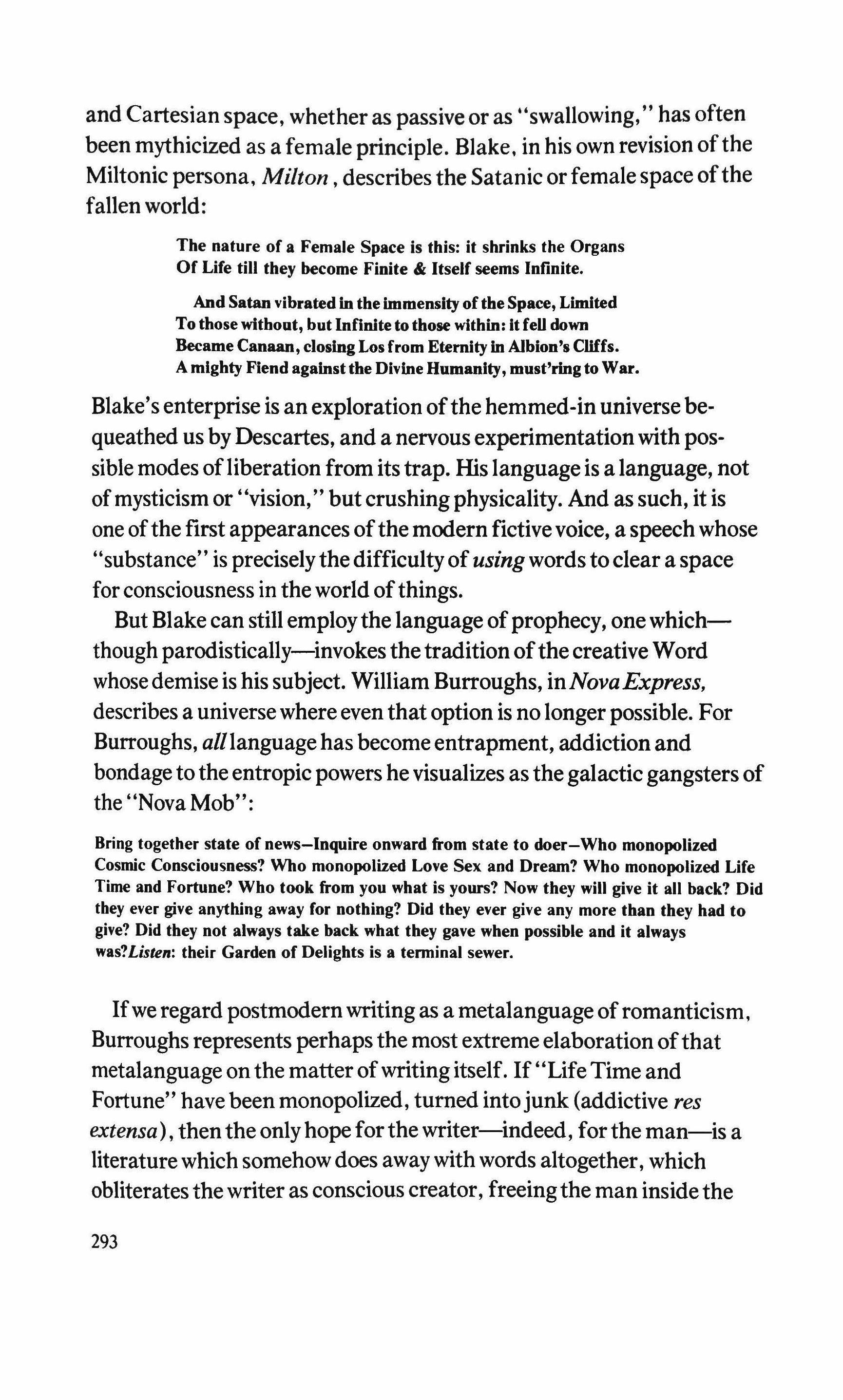
and Cartesian space, whether as passive or as "swallowing," has often been mythicized as a female principle. Blake. in his own revision ofthe Miltonic persona. Milton, describes the Satanic or female space ofthe fallen world:
The nature of a Female Space is this: it shrinks the Organs Of Life till they become Finite & Itself seems Infinite. And Satan vibrated In the immensity ofthe Space, Limited To those without, but Infinite to those within: It feU down Became Canaan, closing Los from Eternity In Albion's CUffs. A mighty Fiend againstthe Divine Humanity, must'rlng to War.
Blake's enterprise is an exploration ofthe hemmed-in universe bequeathed us byDescartes, and a nervous experimentationwith possible modes ofliberation from its trap. His language is a language, not ofmysticism or "vision," but crushingphysicality. And as such, it is one ofthe first appearances ofthe modern fictivevoice, a speech whose "substance" is preciselythedifficultyofusing words to clear a space for consciousness in the world ofthings.
But Blake can still employthe language ofprophecy, one whichthoughparodistically-invokes thetradition ofthe creative Word whosedemise is his subject. William Burroughs, inNovaExpress, describes a universewhere even that option is no longerpossible. For Burroughs, alllanguagehas become entrapment, addiction and bondage to the entropic powers he visualizes as thegalacticgangsters of the "Nova Mob":
Bring together state of news-Inquire onward from state to doer-Who monopolized Cosmic Consciousness? Who monopolized Love Sex and Dream? Who monopolized Life Time and Fortune? Who took from you what is yours? Now they will give it all back? Did they ever give anything away for nothing? Did they ever give any more than they had to give? Did they not always take back what they gave when possible and it always was?Listen: their Garden of Delights is a terminal sewer.
If we regardpostmodernwriting as a metalanguage ofromanticism. Burroughs represents perhaps the most extreme elaboration ofthat metalanguage on the matter ofwritingitself. If "Life Time and Fortune" have been monopolized, turned intojunk (addictive res extensa), then the onlyhope forthe writer-indeed, forthe man-is a literature which somehow does away with words altogether, which obliterates thewriter as conscious creator, freeingthe man inside the
293
writerfrom "other men's systems" in a liberation so austere that it threatens to obliterate his humanityitself.
There are many good reasons why our examination should take us from Blake to Burroughs, from an English romantic poet to a distinctively American antinovelist. Leslie Fiedler once called America a land doomed to play out the imaginarychildhood of Europe-the childhood, that is, of Rousseau's noble savage, Chateaubriand's metaphysical Indians, Schiller's "naive" poet or Wordsworth's infantile "mightyprophet, seer blest." But then America, as projection and livingquotation ofEuropean romanticism, is also a land doomed to live out the attendant nightmareofthat fantastic childhood: a civilization condemned to invent its possibilities within the very landscape ofthe Garden as Dragon's Corpse. This is partlywhat Gertrude Stein meant when, in TheAutobiographyoJAliceB. Toklas, she called Americathe most modern country in the world because ofits "abstract disembodied" quality. But Claude Levi-Strauss puts it more precisely in his own discoveryofAmerica, Tristes Tropiques, when he comments on the "naturalness" ofAmerican cities. The found land of Europeanmythologicalyearnings is a cartoon, a caricature, ofthe romantic sublime:
Our [European]judgments are. permeated and deformedbythis difference of scale. Those who call New York ugly, for instance, have simply falled to make the necessaey change ofregistration. Objectively, no doubt, New York I. a city, and can bejudged one; but the spectacle which It offers to a Europeansensibility Is of a different order of magnitude: that of European landscape; whereas American landscape offers 01, In tum, an altogether more monumental scheme of things, and one for which we have no equivalent.
"No equivalent," that is, save in the infinite and terrifyingprospects ofGoethe's Faust, Byron's Cain, or thevertiginous, seductive and dangerousfoliage ofChateaubriand's Ata/a. Levi-Strauss's own Rousseauistic vision is, in fact, perhaps the last historic instance of Europe's psychic imperialism over its most interestingcolony. For he insists upon havingdiscovered the key to all mythologies amongthe not-quite-noble savages ofBrazil at the very moment-the eve ofWorld War II-when American writing, like American civilization, was to assume thefull mantle of its heritage ofromantic self-consciousness: its immitigable exile into what Robert Lowell called at that time the Land ofUnlikeness, its double bondage to the conviction ofits own fictiveness and the pressure ofthe world's mute weight.
294
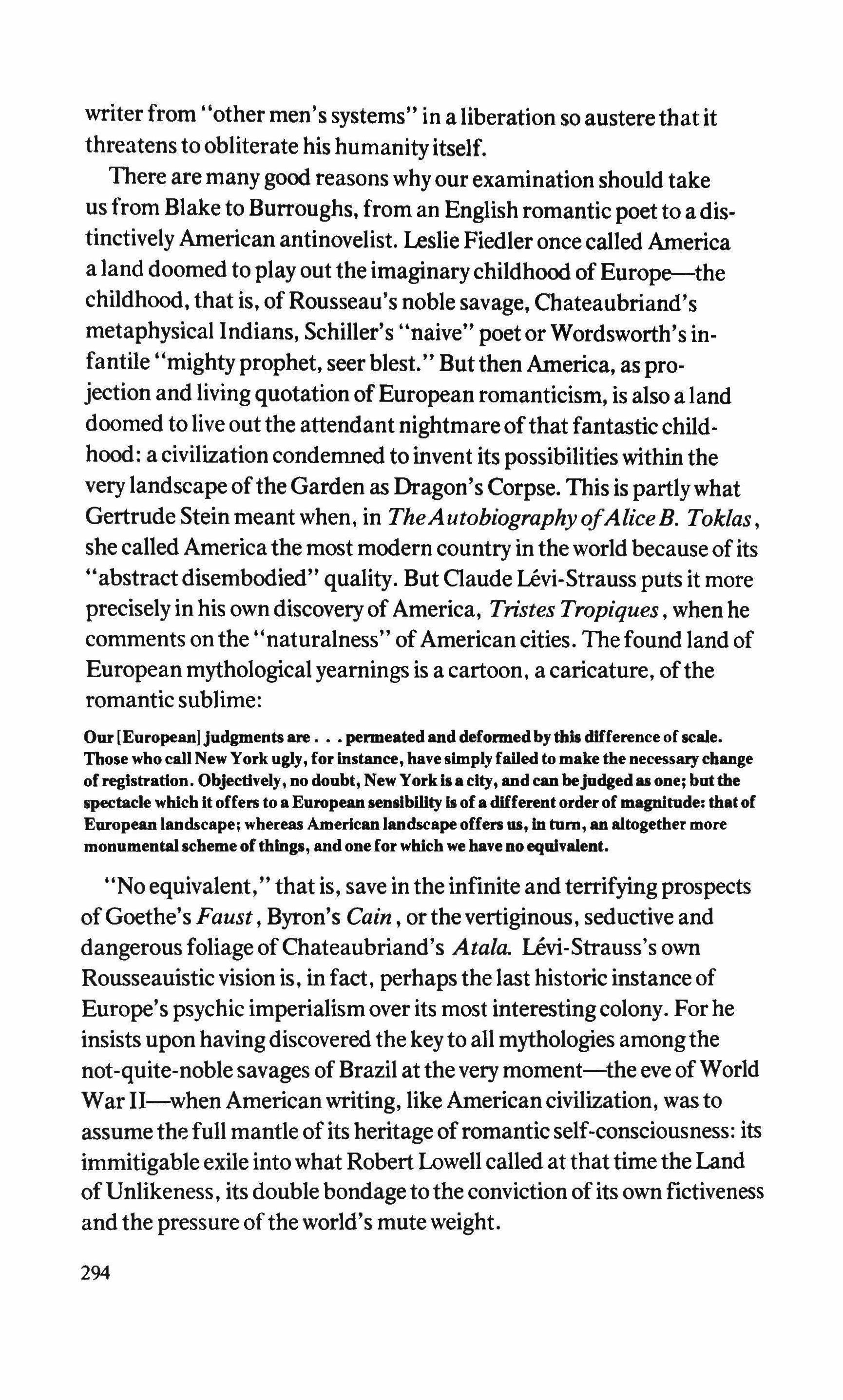
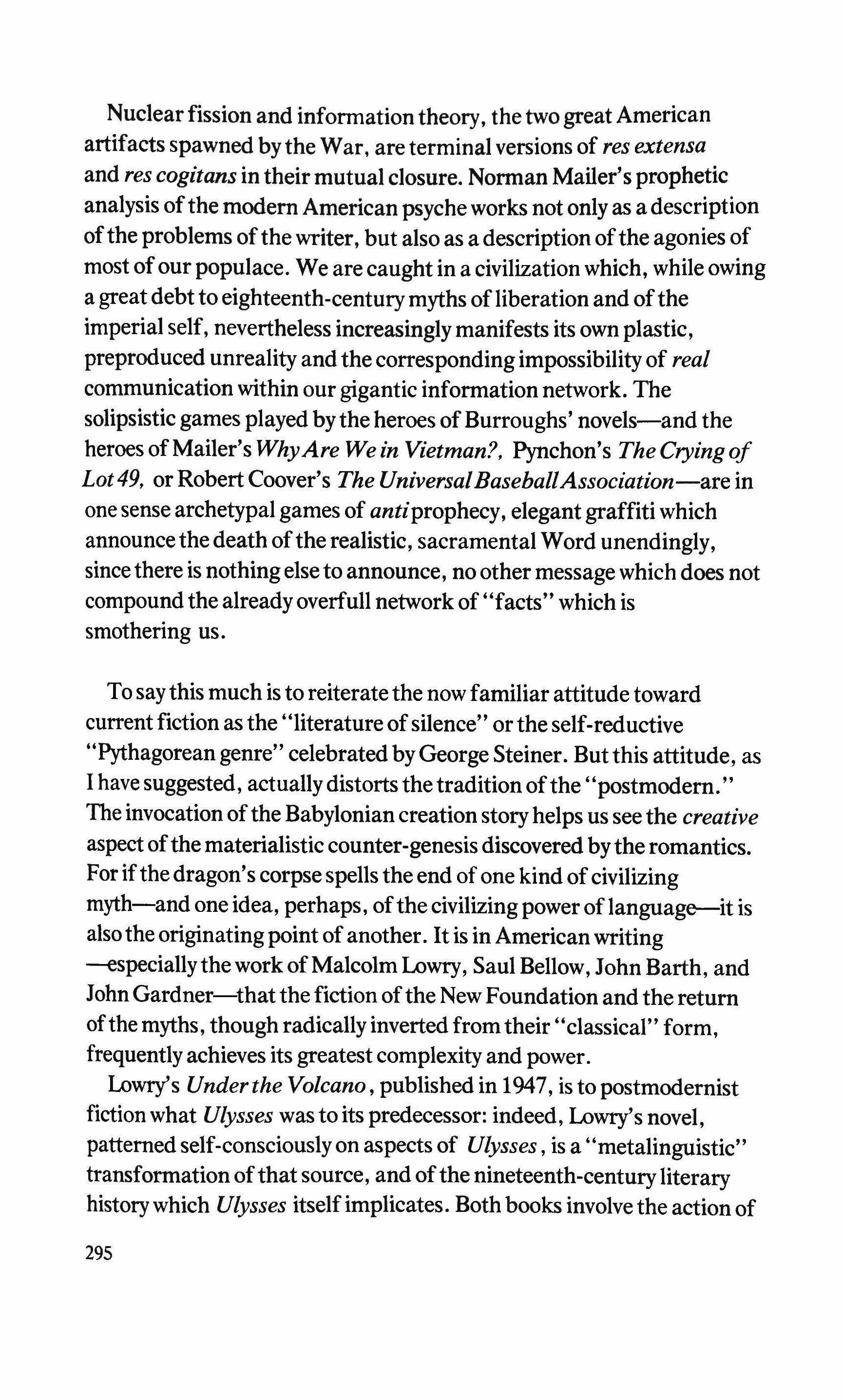
Nuclear fission and information theory, the two great American artifacts spawnedby the War, are terminal versions of res extensa and res cogitans in theirmutual closure. Norman Mailer's prophetic analysis ofthe modern American psyche works not only as a description ofthe problems ofthe writer, but also as a description ofthe agonies of most of our populace. We are caught in a civilization which, while owing a great debt to eighteenth-centurymyths ofliberation and ofthe imperial self, nevertheless increasinglymanifests its own plastic, preproduced unreality and the correspondingimpossibility of real communication within our gigantic information network. The solipsistic games playedbythe heroes ofBurroughs' novels-and the heroes of Mailer's WhyAre We in Vietman?, Pynchon's The Crying of Lot49, or Robert Coover's The UniversalBaseballAssociation-are in one sense archetypal games of antiprophecy, elegantgraffitiwhich announce the death ofthe realistic, sacramental Word unendingly, sincethere is nothingelseto announce, no other message which does not compound the alreadyoverfull network of "facts" which is smothering us.
To say this much is to reiterate the now familiar attitude toward current fiction as the "literature ofsilence" or the self-reductive "Pythagoreangenre" celebrated byGeorge Steiner. But this attitude, as I have suggested, actually distorts the tradition ofthe "postmodern." The invocation ofthe Babylonian creation storyhelps us see the creative aspect ofthe materialistic counter-genesis discovered bythe romantics. For ifthe dragon's corpse spells the end of one kind ofcivilizing myth-and one idea, perhaps, ofthe civilizing power oflanguage-it is alsothe originatingpoint ofanother. It is in Americanwriting -especiallythework of Malcolm Lowry, Saul Bellow, John Barth, and JohnGardner-that the fiction ofthe New Foundation and the return ofthe myths, though radically inverted fromtheir"classical" form, frequently achieves its greatest complexity and power.
Lowry's Underthe Volcano, published in 1947, is to postmodernist fiction what Ulysses was to its predecessor: indeed, Lowry's novel, patternedself-consciously on aspects of Ulysses, is a "metalinguistic" transformation ofthat source, and ofthe nineteenth-centuryliterary history which Ulysses itself implicates. Both books involve the action of
295
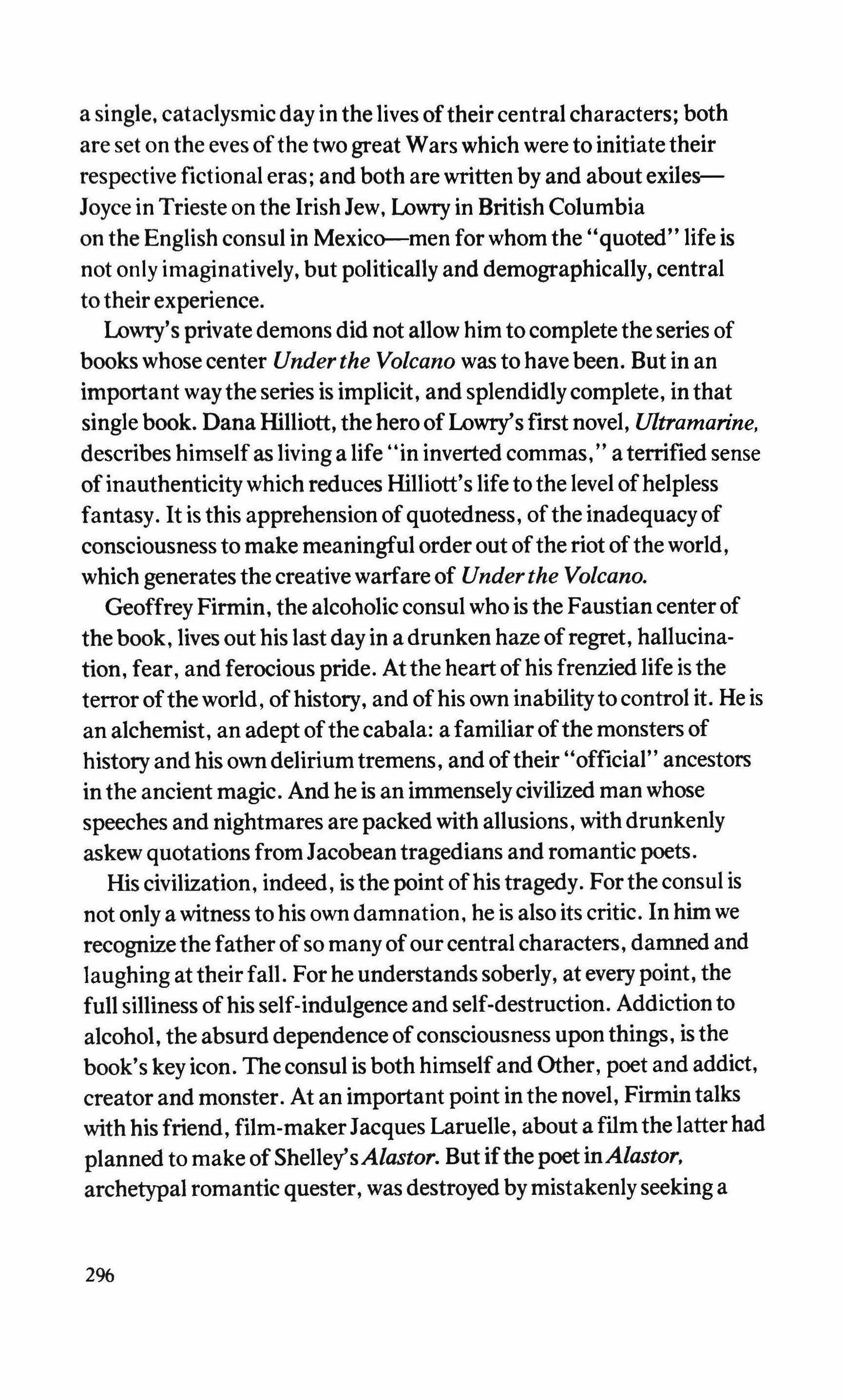
a single, cataclysmicday in the lives oftheir central characters; both are set on the eves ofthe two great Wars which were to initiate their respective fictional eras; and both are written by and about exilesJoyce in Trieste on the Irish Jew, Lowry in British Columbia on the English consul in Mexico-men for whom the "quoted" life is not only imaginatively, but politically and demographically, central to their experience.
Lowry's private demons did not allow him to complete the series of books whose center Underthe Volcano was to have been. But in an important waythe series is implicit, and splendidlycomplete, in that single book. Dana Hilliott, the hero of Lowry's first novel, Ultramarine, describes himself as living a life "in inverted commas," a terrified sense ofinauthenticity which reduces Hilliott's life to the level ofhelpless fantasy. It is this apprehension ofquotedness, ofthe inadequacy of consciousness to make meaningful order out ofthe riot ofthe world, which generates the creativewarfare of Underthe Volcano.
Geoffrey Firmin, the alcoholic consul who is the Faustian center of the book, lives out his last day in a drunken haze ofregret, hallucination, fear, and ferocious pride. At the heart of his frenzied life is the terror ofthe world, ofhistory, and ofhis own inabilityto control it. He is an alchemist, an adept ofthe cabala: a familiarofthe monsters of history and his own delirium tremens, and oftheir "official" ancestors in the ancient magic. And he is an immenselycivilized man whose speeches and nightmares are packed with allusions, with drunkenly askew quotations from Jacobean tragedians and romantic poets. His civilization, indeed, is the point ofhis tragedy. Forthe consul is not only a witness to his own damnation, he is also its critic. In him we recognizethe father of so manyof our centralcharacters, damned and laughing at their fall. For he understands soberly, at every point, the full silliness ofhis self-indulgence and self-destruction. Addiction to alcohol, the absurd dependence ofconsciousness upon things, is the book's key icon. The consul is both himselfand Other, poet and addict, creator and monster. At an important point in the novel, Firmin talks with his friend, film-makerJacques Laruelle, about a filmthe latter had planned to make of Shelley'sAlastor. But ifthe poet inAlastor, archetypal romantic quester, was destroyedbymistakenlyseeking a
296
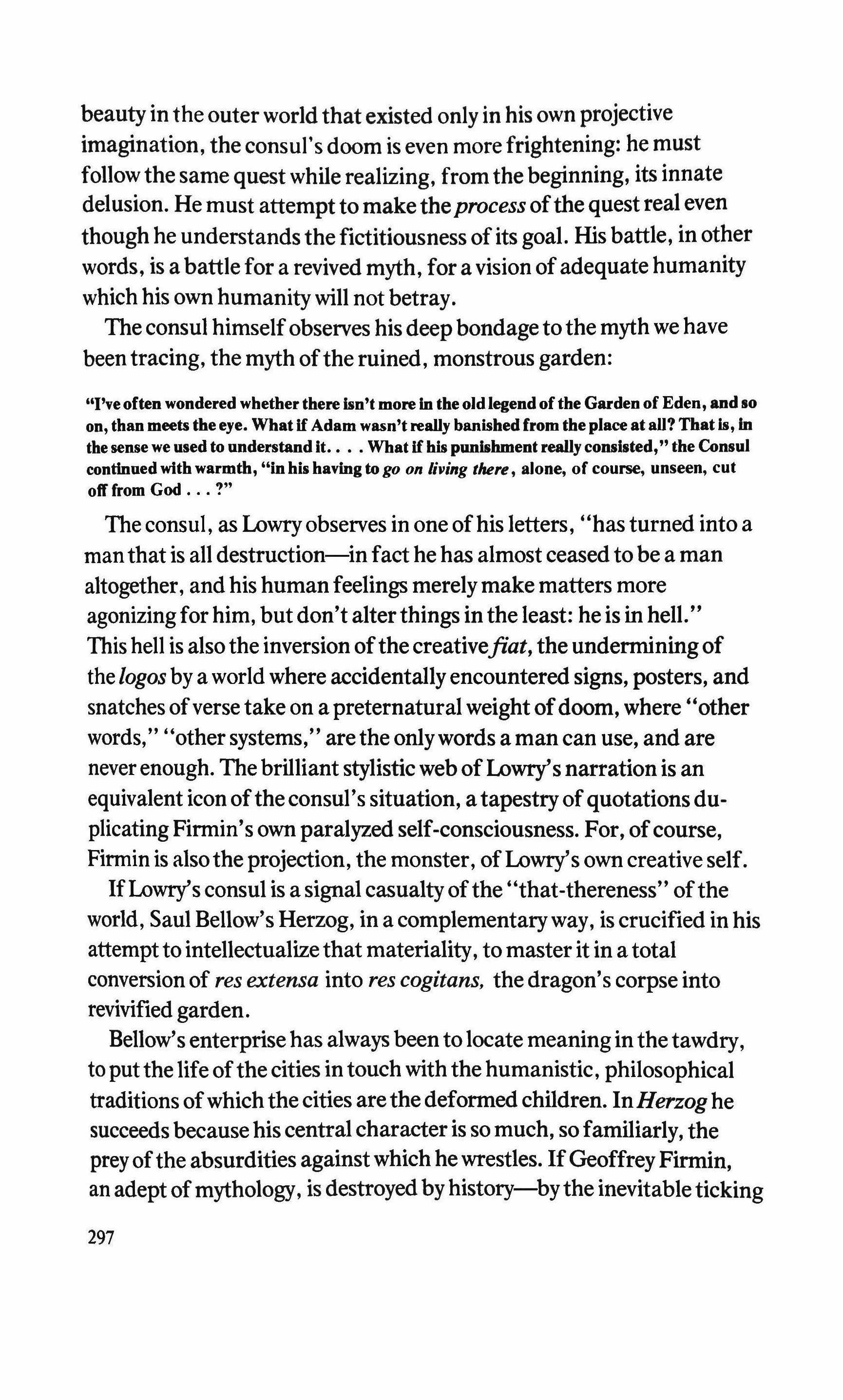
beauty in the outer world that existed only in his own projective imagination, the consul's doom is even more frightening: he must followthe same quest while realizing, from the beginning, its innate delusion. He must attempt to make theprocess ofthe quest real even though he understands the fictitiousness ofits goal. His battle, in other words, is a battle for a revived myth, for a vision ofadequatehumanity which his own humanity will not betray.
The consul himselfobserves his deepbondage to the myth we have been tracing, the myth ofthe ruined, monstrous garden:
"I've often wondered whether there Isn't more In the oldlegend ofthe Garden of Eden, and 10 on, than meets the eye. What If Adam wasn't really banished from the place at aU? That Is, In the sense we used to understand it.. What If his punishmentreallyconsisted," the Consul continued with warmth, "in his having to go on living there, alone, of course, unseen, cut oft' from God ?"
The consul, as Lowryobserves in one ofhis letters, "has turned into a man that is all destruction-in fact he has almost ceased to be a man altogether, and his human feelings merely make matters more agonizingfor him, but don't alterthings in the least: he is in hell." This hell is alsothe inversion ofthe creativefiat, the underminingof thelogosby a world where accidentallyencountered signs, posters, and snatches ofverse take on a preternaturalweight ofdoom, where"other words," "other systems," are the onlywords a man can use, and are never enough. The brilliant stylistic web ofLowry's narration is an equivalent icon oftheconsul's situation, a tapestry ofquotations duplicating Firmin's own paralyzed self-consciousness. For, ofcourse, Firmin is alsothe projection, the monster, ofLowry's own creative self.
IfLowry's consul is a signalcasualtyofthe "that-thereness" ofthe world, Saul Bellow's Herzog, in a complementaryway, is crucified in his attempt to intellectualize that materiality, to master it in a total conversion of res extensa into res cogitans, the dragon's corpse into revivified garden.
Bellow's enterprise has always been to locate meaning inthetawdry, to putthelife ofthe cities in touch with the humanistic, philosophical traditions ofwhich thecities are the deformed children. InHerzoghe succeeds becausehis central character is so much, so familiarly, the preyofthe absurdities againstwhich hewrestles. IfGeoffreyFirmin, an adept ofmythology, is destroyedbyhistory-bythe inevitableticking
297
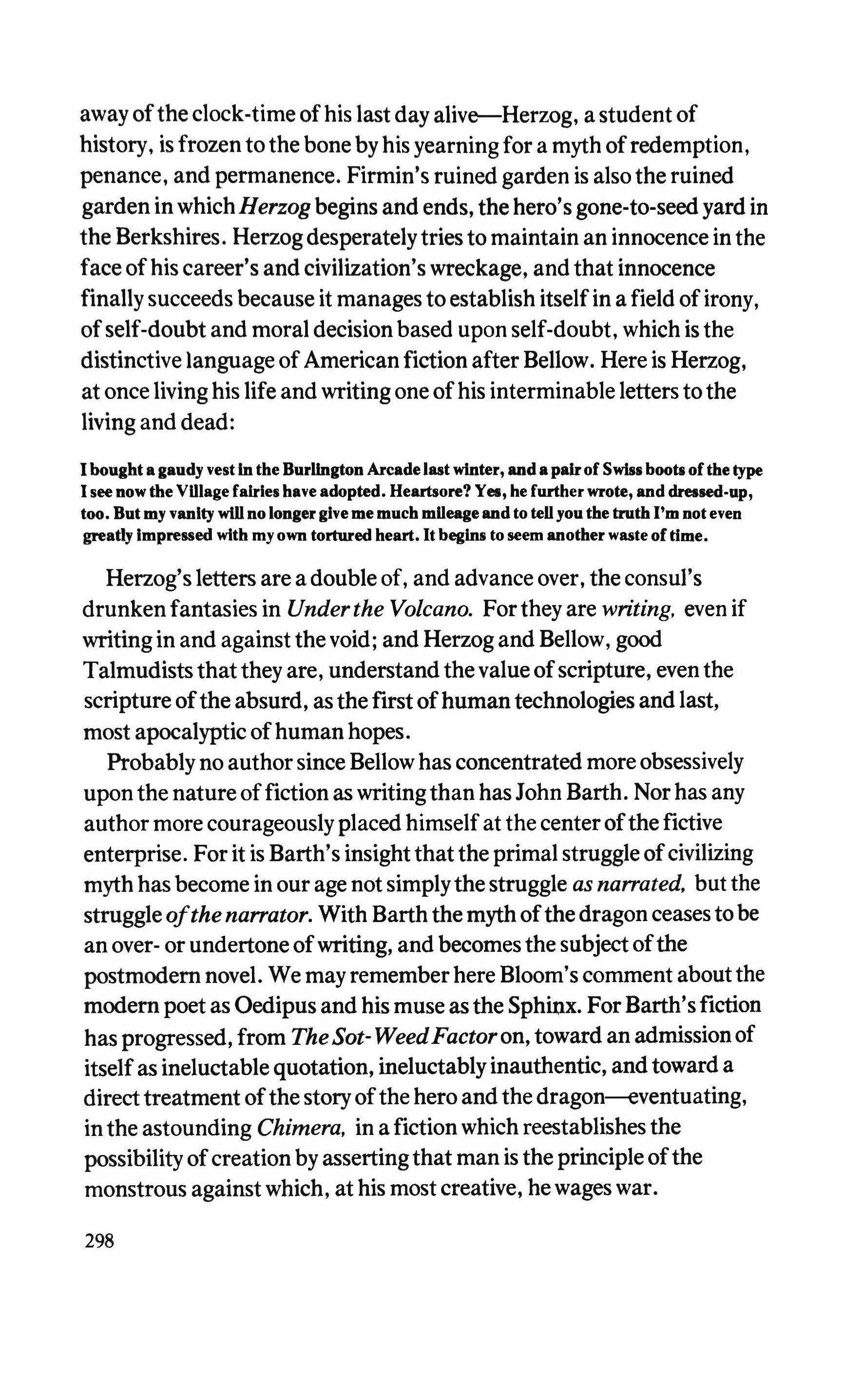
away ofthe clock-time ofhis last dayalive-Herzog, a student of history, is frozen to the bone by his yearning for a myth ofredemption, penance, and permanence. Firmin's ruined garden is also the ruined garden inwhichHerzogbegins and ends, the hero's gone-to-seedyard in the Berkshires. Herzogdesperatelytries to maintain an innocence in the face ofhis career's and civilization's wreckage, and that innocence finally succeeds because it manages to establish itselfin a field ofirony, ofself-doubt and moral decision based upon self-doubt, which is the distinctive language ofAmerican fiction after Bellow. Here is Herzog, at once livinghis life and writing one ofhis interminable letters to the living and dead:
I bought a gaudy vest In the Burlington Arcade last winter, and a pairof Swiss beets of the type I see now the VOIage fairies have adopted. Heartlore? Yes, he furtherwrote, and dressed·ap, too. But my vanity will no longergive me much mUeage and to teU you the truth I'm not even greatly Impressed with my own tortured heart. It begins to seem another waste of time.
Herzog's letters are a double of, and advance over, the consul's drunken fantasies in Underthe Volcano. Forthey are writing, even if writingin and against the void; and Herzog and Bellow, good Talmudists that they are, understand thevalue ofscripture, even the scriptureofthe absurd, as the firstofhuman technologies and last, most apocalyptic ofhuman hopes.
Probably no author since Bellowhas concentrated more obsessively upon the nature offiction as writingthan hasJohn Barth. Nor has any author more courageouslyplaced himself at the center ofthe fictive enterprise. For it is Barth's insightthat the primal struggle ofcivilizing myth has become in our age not simplythe struggle as narrated, but the struggleofthe narrator. With Barth the myth ofthe dragon ceases tobe an over- or undertone ofwriting, and becomes the subject ofthe postmodern novel. We may remember here Bloom's comment aboutthe modern poet as Oedipus and his muse as the Sphinx. For Barth's fiction has progressed, from TheSot- WeedFactor on, toward an admissionof itself as ineluctablequotation, ineluctablyinauthentic, and toward a direct treatment ofthe story ofthe hero and the dragon--eventuating, in the astounding Chimera, in a fiction which reestablishes the possibility ofcreation byassertingthat man is the principle ofthe monstrous againstwhich, at his most creative, hewages war.
298
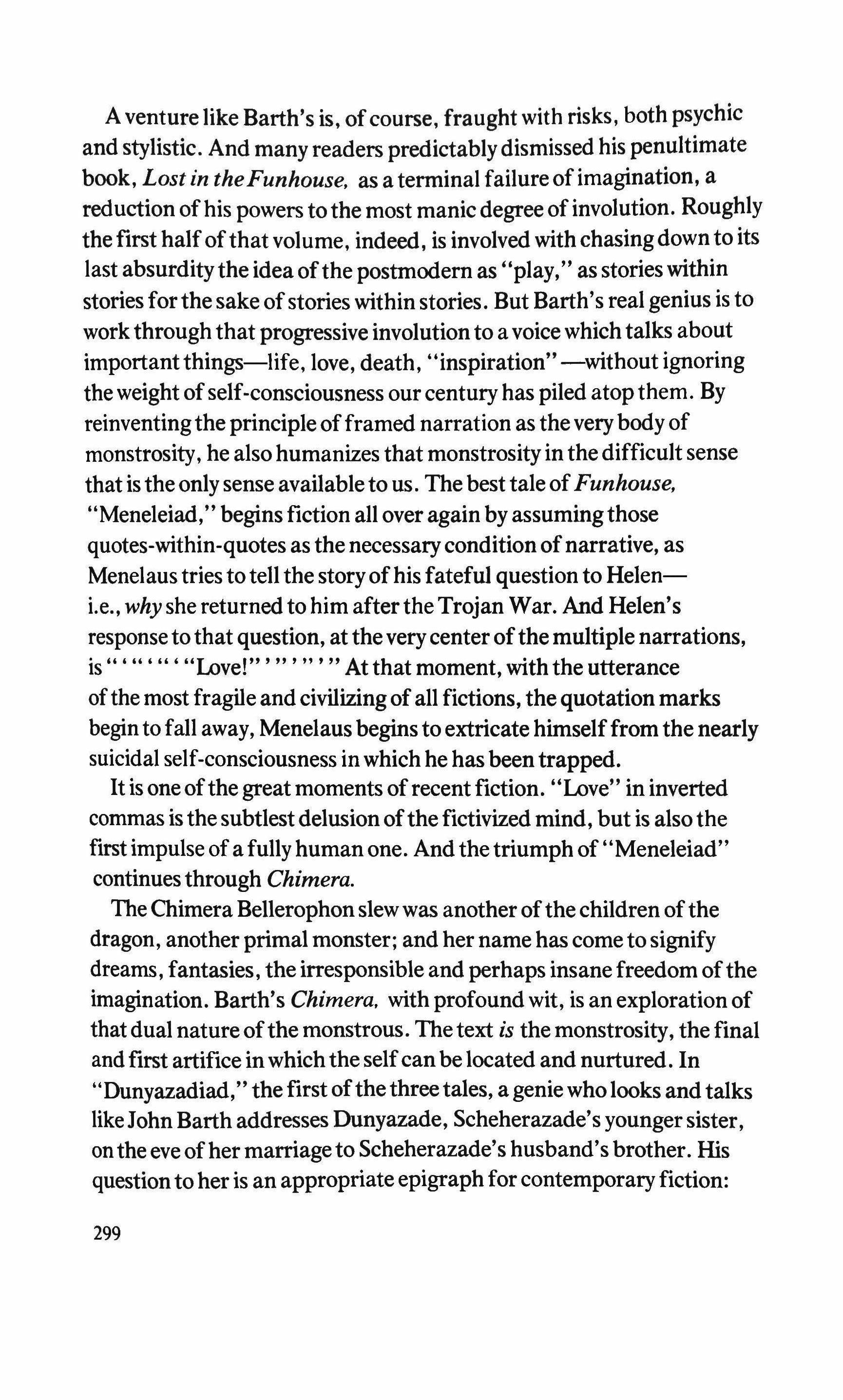
A venture like Barth's is, of course, fraught with risks, both psychic and stylistic. And many readers predictablydismissed his penultimate book, Lost in theFunhouse, as a terminal failureofimagination, a reduction ofhis powers to the most manic degree ofinvolution. Roughly the first halfofthat volume, indeed, is involved with chasingdown to its last absurditythe idea ofthe postmodern as "play," as stories within stories forthe sake ofstories within stories. But Barth's real genius is to work through that progressive involution to a voice which talks about importantthings-life, love, death, "inspiration" -without ignoring theweight ofself-consciousness our century has piled atopthem. By reinventingthe principle offramed narration as theverybody of monstrosity, he also humanizes that monstrosity in the difficult sense that istheonly sense available to us. The best tale ofFunhouse, "Meneleiad," begins fiction all over againbyassumingthose quotes-within-quotes as the necessarycondition ofnarrative, as Menelaus tries to tell the storyofhis fateful question to Heleni.e., why she returned to him after the Trojan War. And Helen's response to that question, at thevery center ofthe multiple narrations, is" "Love!" " " At that moment, with the utterance ofthe most fragile and civilizingofall fictions, the quotation marks begin to fall away, Menelaus begins to extricate himselffrom the nearly suicidal self-consciousness in which he has beentrapped. It is one ofthe great moments ofrecent fiction. "Love" in inverted commas isthe subtlest delusion ofthe fictivized mind, but is alsothe firstimpulse of a fully human one. And the triumph of "Meneleiad" continues through Chimera.
The Chimera Bellerophon slew was another ofthe children ofthe dragon, another primal monster; and her name has come to signify dreams, fantasies, the irresponsible and perhaps insane freedom ofthe imagination. Barth's Chimera. with profound wit, is an exploration of that dual nature ofthe monstrous. The text is the monstrosity, the final andfirst artifice inwhichthe self can be located and nurtured. In "Dunyazadiad," the first ofthethree tales, a geniewholooks and talks likeJohn Barth addresses Dunyazade, Scheherazade's youngersister, on the eve ofher marriageto Scheherazade's husband's brother. His questionto her is an appropriateepigraph for contemporaryfiction:
299
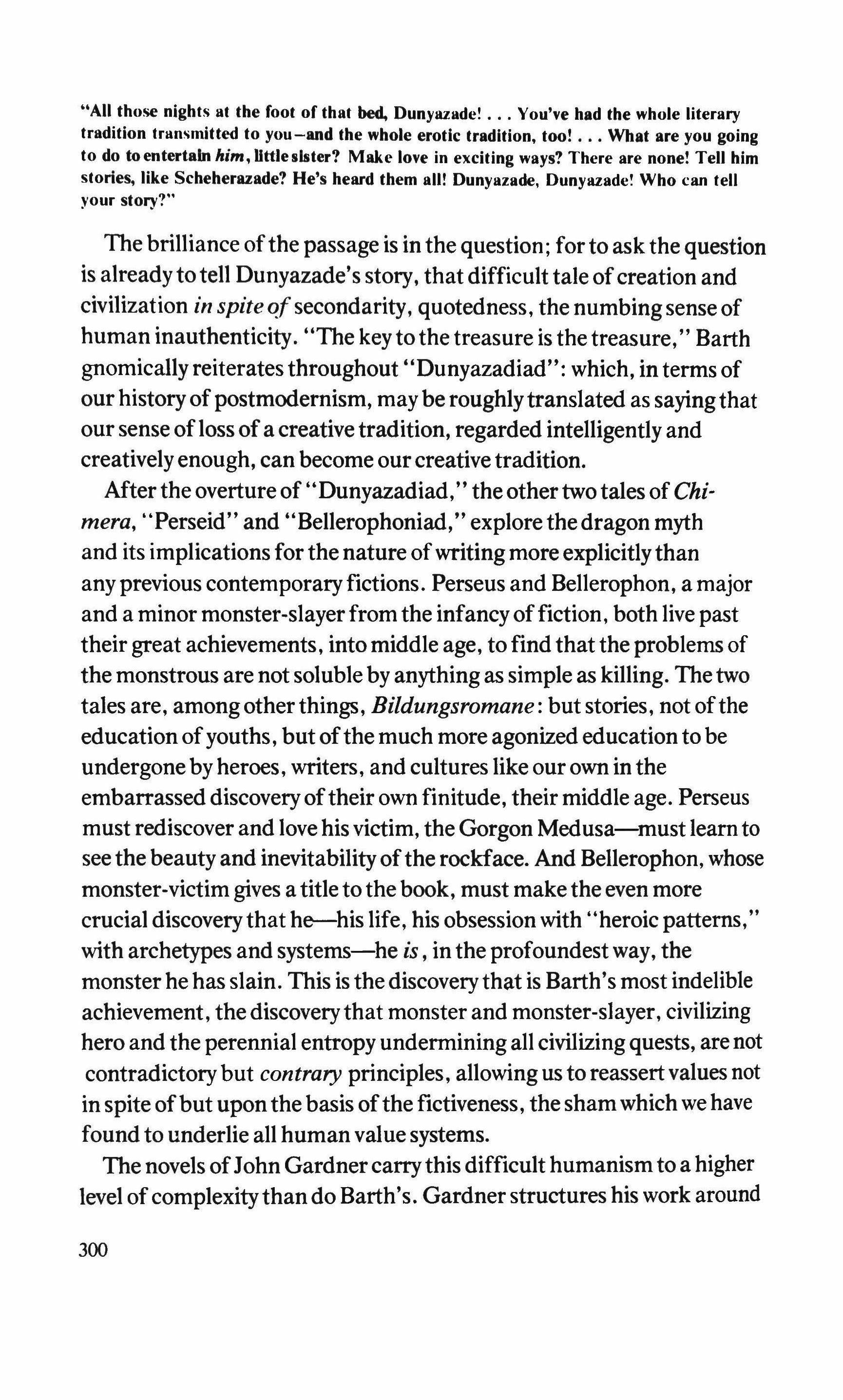
"All those nights at the foot of that bed, Dunyazade! You've had the whole literary tradition transmitted to you-and the whole erotic tradition, too! What are you going to do to entertain him, little sisler? Make love in exciting ways? There are none! Tell him stories, like Scheherazade? He's heard them all! Dunyazade, Dunyazade! Who can tell your story?"
The brilliance ofthe passage is in the question; for to ask the question is already to tell Dunyazade's story, that difficult tale ofcreation and civilization in spiteofsecondarity, quotedness, the numbing sense of human inauthenticity. "The key to the treasure is the treasure," Barth gnomically reiterates throughout "Dunyazadiad": which, in terms of our historyofpostmodernism, may be roughlytranslated as sayingthat our sense ofloss of a creativetradition, regarded intelligently and creativelyenough, can become our creative tradition.
After the overture of "Dunyazadiad," theother two tales of Chimera, "Perseid" and "Bellerophoniad,"explore thedragon myth and its implications forthe nature ofwriting more explicitlythan any previous contemporaryfictions. Perseus and Bellerophon, a major and a minor monster-slayerfrom the infancyoffiction, both live past their great achievements, intomiddle age, to find that the problems of the monstrous are not soluble byanything as simple as killing. The two tales are, among other things, Bildungsromane: but stories, not ofthe education ofyouths , but ofthe much more agonized education to be undergonebyheroes, writers, and cultures like our own in the embarrassed discoveryoftheir own finitude, their middle age. Perseus must rediscover and love his victim, the Gorgon Medusa-must learn to see the beauty and inevitability ofthe rockface. And Bellerophon, whose monster-victim gives a title to the book, must make the even more crucial discoverythat he-his life, his obsession with "heroic patterns," with archetypes and systems-he is, in the profoundest way, the monster he has slain. This is the discoverythat is Barth's most indelible achievement, the discoverythat monster and monster-slayer, civilizing hero and the perennial entropy undermining all civilizingquests, are not contradictory but contrary principles, allowing us to reassert values not in spite ofbut upon the basis ofthe fictiveness, the sham which we have found to underlie all human value systems.
The novels ofJohn Gardnercarry this difficult humanism to a higher level ofcomplexitythando Barth's. Gardner structures his work around 300
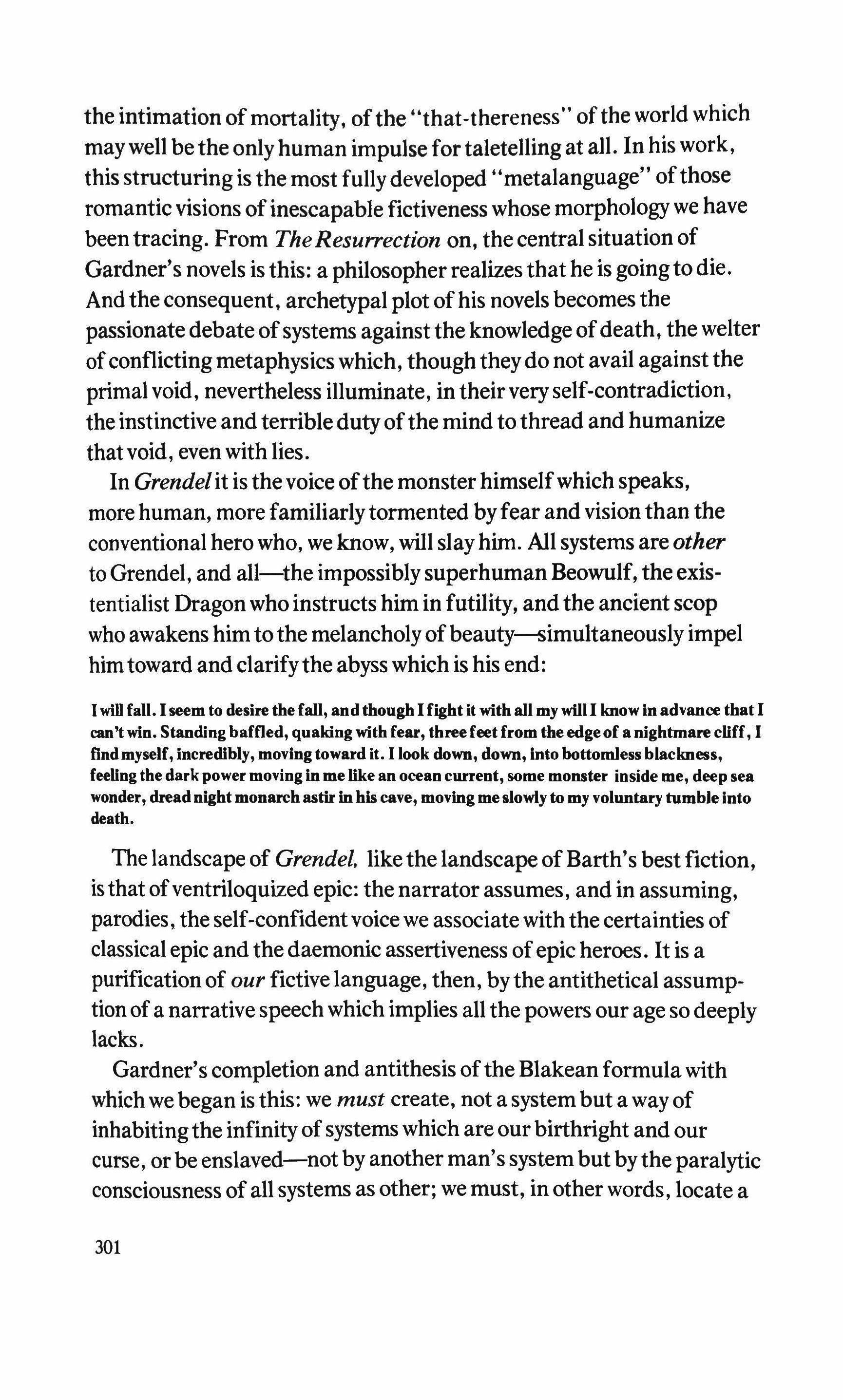
the intimation of mortality, ofthe "that-thereness" ofthe world which may well be the onlyhuman impulse fortaletelling at all. In his work, this structuring is the most fullydeveloped "metalanguage" ofthose romantic visions ofinescapable fictiveness whose morphology we have beentracing. From TheResurrection on, the central situation of Gardner's novels is this: a philosopher realizes that he is goingto die. Andthe consequent, archetypal plot of his novels becomes the passionate debate ofsystems against the knowledge ofdeath, the welter ofconflictingmetaphysicswhich, thoughtheydo not avail against the primalvoid, nevertheless illuminate, in their very self-contradiction, the instinctive and terrible dutyofthe mind to thread and humanize thatvoid, even with lies.
In Grendelit is the voice ofthe monster himselfwhich speaks, more human, more familiarlytormented byfear and vision than the conventional hero who, we know, will slayhim. All systems are other to Grendel, and all-the impossiblysuperhuman Beowulf, the existentialist Dragon who instructs him in futility, and the ancient scop who awakens him tothe melancholyofbeauty-simultaneouslyimpel himtoward and clarifythe abyss which is his end:
I will fall. I seem to desire the fall, and though I fight it with all my wUl I know In advance that I can't win. Standingbaffled, quaking with fear, three feetfrom the edgeof a nightmarecliff, I findmyself, incredibly, moving toward it. I look down, down, Into bottomless blackness, feeling the dark power moving in me like an ocean current, some monster inside me, deep sea wonder, dread night monarch astir in his cave, mOl'ing me slowly to my voluntary tumble Into death.
The landscape of Grendel. like the landscape of Barth's best fiction, isthat ofventriloquizedepic: the narrator assumes, and in assuming, parodies. the self-confidentvoice we associate with the certainties of classical epic and the daemonic assertiveness ofepic heroes. It is a purification of our fictivelanguage, then, by the antithetical assumption of a narrative speech which implies all the powers our age so deeply lacks.
Gardner's completion and antithesis ofthe Blakean formula with which we began is this: we must create, not a system but a way of inhabitingthe infinity ofsystems which are our birthright and our curse, or be enslaved-not by another man's system butbythe paralytic consciousness ofall systems as other; we must, in other words, locate a
301
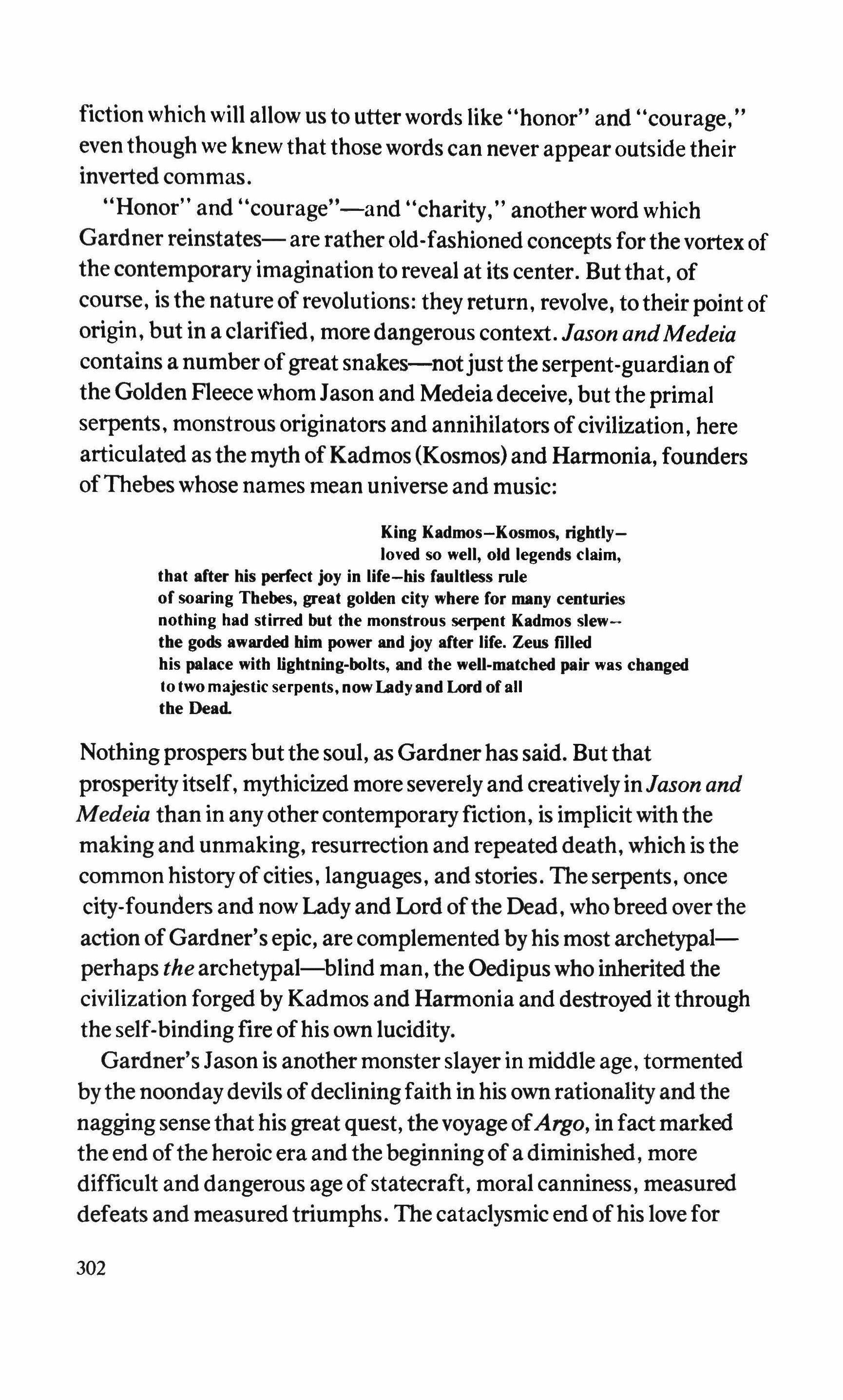
fiction which will allow us to utter words like "honor" and "courage," even though we knew that those words can never appear outside their inverted commas.
"Honor" and "courage"-and "charity," another word which Gardner reinstates- are rather old-fashioned concepts for the vortex of the contemporary imagination to reveal at its center. Butthat, of course, is the nature of revolutions: they return, revolve, to their point of origin, but in a clarified, more dangerous context. Jason andMedeia contains a number ofgreat snakes-notjustthe serpent-guardian of the Golden Fleece whom Jason and Medeiadeceive, but the primal serpents, monstrous originators and annihilators ofcivilization, here articulated as the myth of Kadmos (Kosmos) and Harmonia, founders ofThebes whose names mean universe and music:
King Kadmos-Kosmos, rightlyloved so well, old legends claim, that after his perfect joy in life-his faultless rule of soaring Thebes, great golden city where for many centuries nothing had stirred but the monstrous serpent Kadmos slewthe gods awarded him power and joy after life. Zeus filled his palace with lightning-bolts, and the well-matched pair was changed to two majestic serpents, now Lady and Lord of all the Dead.
Nothing prospers but the soul, as Gardnerhas said. But that prosperityitself, mythicized more severely and creativelyinJason and Medeia than in any othercontemporaryfiction, is implicit with the making and unmaking, resurrection and repeated death, which is the common historyofcities, languages, and stories. The serpents, once city-founders and now Lady and Lord ofthe Dead, whobreed over the action of Gardner's epic, are complementedby his most archetypalperhaps thearchetypal-blind man, the Oedipus who inherited the civilization forged by Kadmos and Harmonia and destroyed it through the self-binding fire ofhis own lucidity.
Gardner's Jason is another monster slayer in middle age, tormented bythe noondaydevils ofdecliningfaith in his own rationality and the nagging sense that his great quest, thevoyage ofAlgo, in fact marked the end ofthe heroic era and thebeginningof a diminished, more difficult and dangerous age ofstatecraft, moral canniness, measured defeats and measured triumphs. The cataclysmic end ofhis love for
302
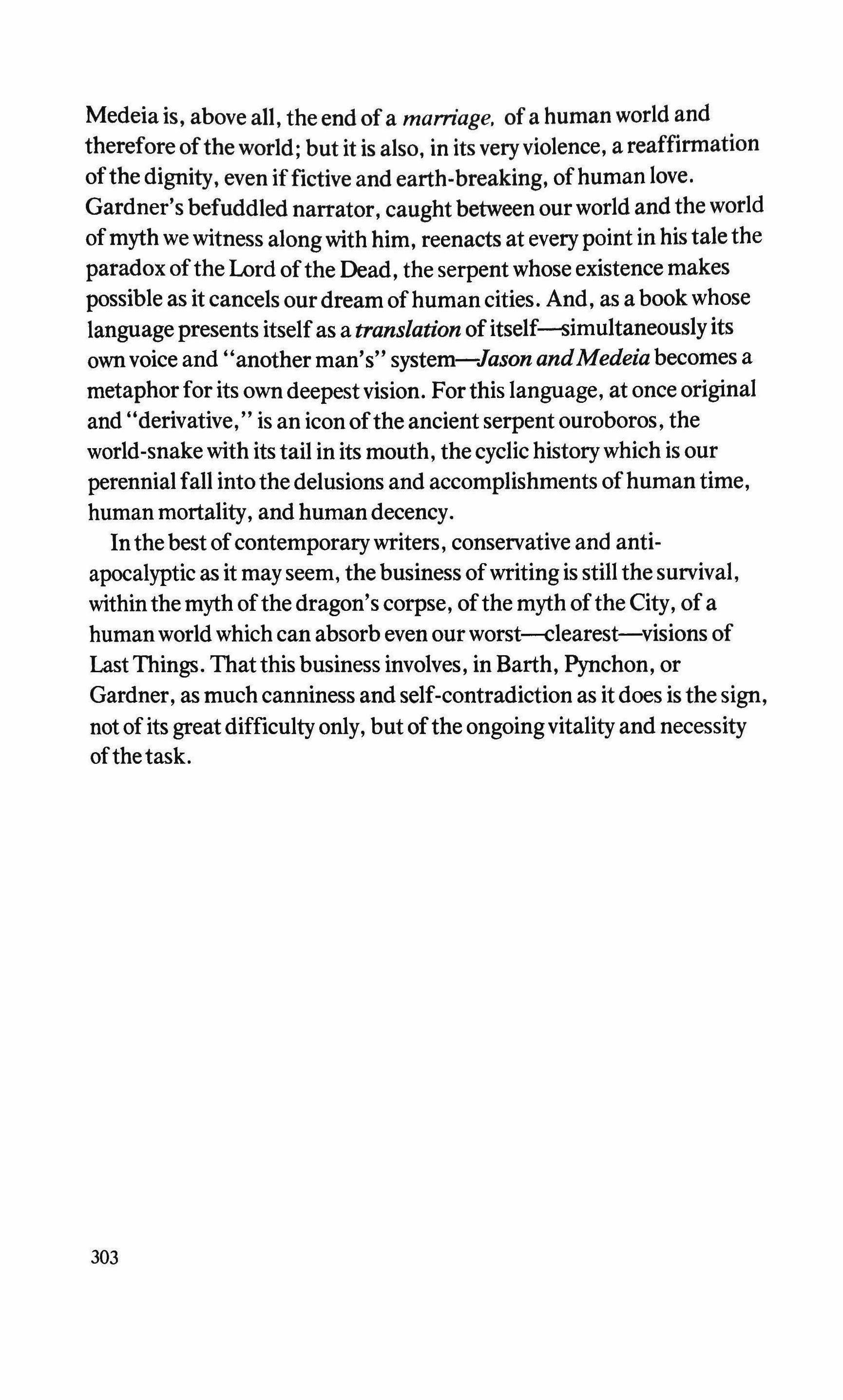
Medeia is, above all, the end of a marriage. of a human world and therefore ofthe world; but it is also, in its veryviolence, a reaffirmation ofthe dignity, even iffictive and earth-breaking, ofhuman love. Gardner's befuddled narrator, caughtbetween our world and the world ofmyth we witness alongwith him, reenacts at every point in his talethe paradox ofthe Lord ofthe Dead, the serpent whose existence makes possible as it cancels our dream ofhuman cities. And, as a book whose languagepresents itself as a translation ofitself-simultaneouslyits own voice and "another man's" system-Jason andMedeia becomes a metaphor for its own deepest vision. Forthis language, at once original and"derivative, " is an icon ofthe ancient serpent ouroboros, the world-snake with its tail in its mouth, thecyclichistorywhich is our perennial fall into the delusions and accomplishments ofhuman time, human mortality, and human decency.
Inthe best ofcontemporarywriters, conservative and antiapocalyptic as it may seem, the business ofwriting is still the survival, within the myth ofthe dragon's corpse, ofthe myth ofthe City, of a humanworld which can absorb even our worst-clearest-visions of Last Things. Thatthis business involves, in Barth, Pynchon, or Gardner, as much canniness and self-contradiction as itdoes isthesign, not ofits greatdifficultyonly, but ofthe ongoingvitality and necessity ofthetask.
303
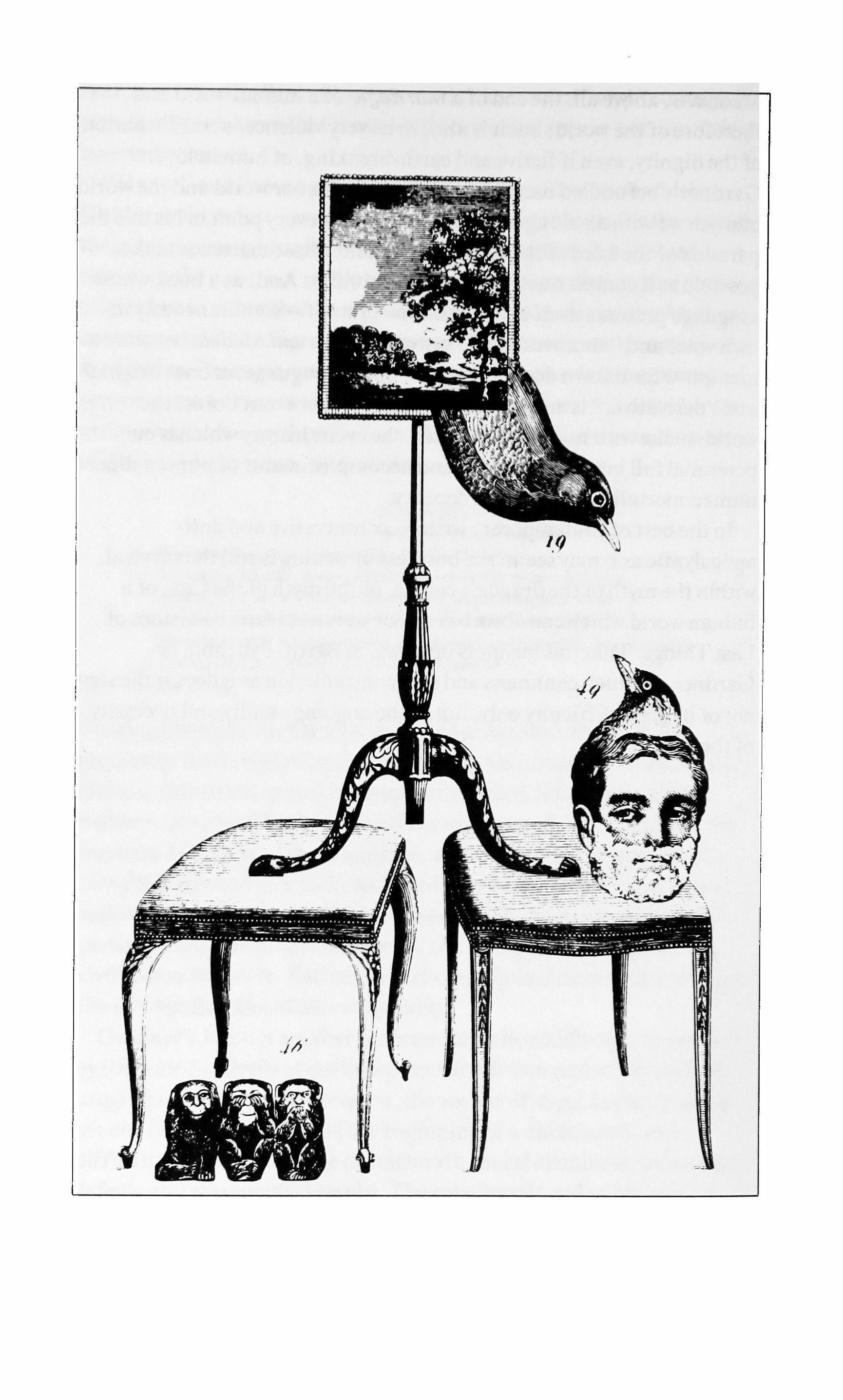
Babbitt at the abyss: the social context ofpostmodem
American fiction
Gerald Graff
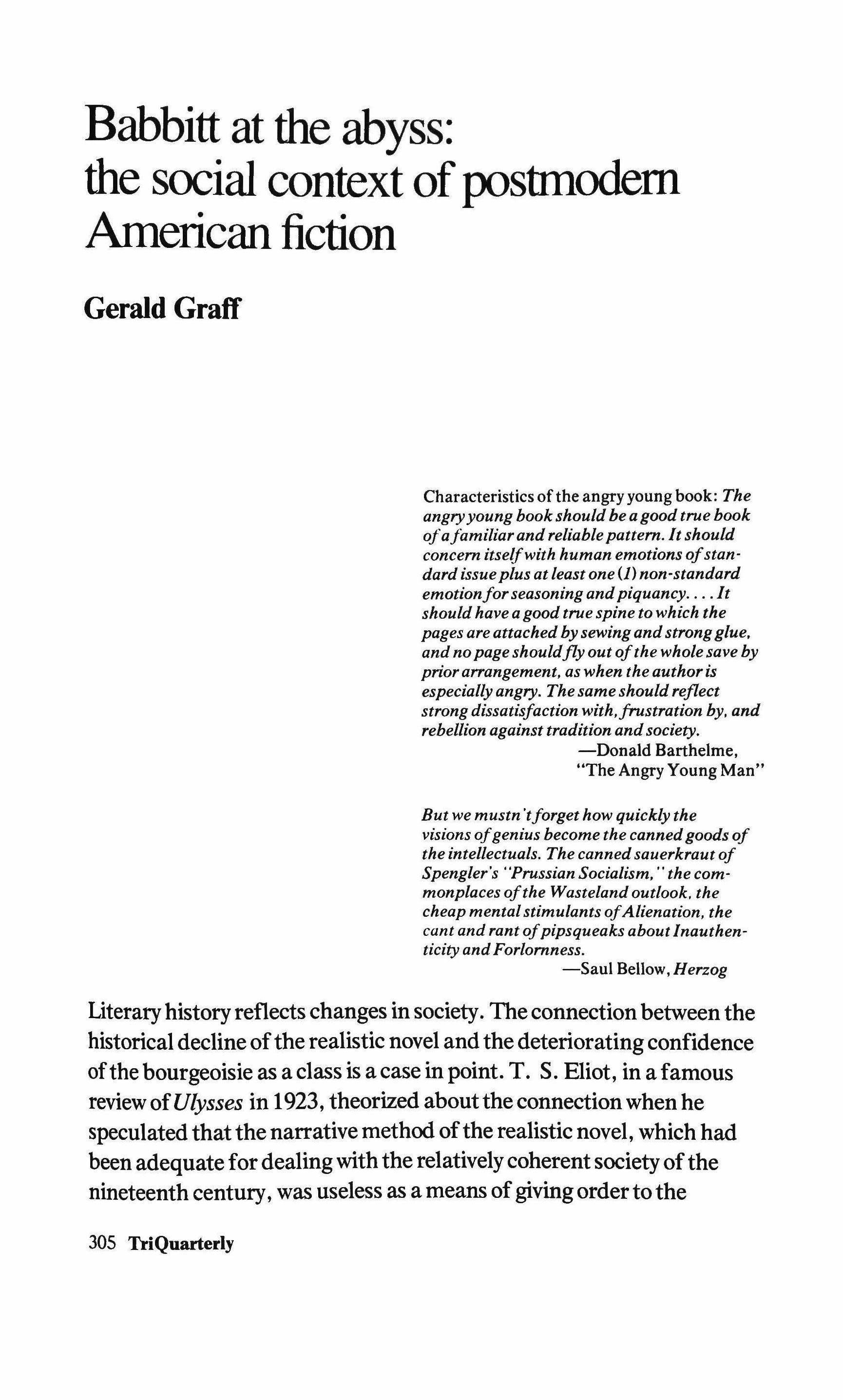
Characteristics ofthe angryyoung book: The angryyoung bookshouldbe a good true book ofafamiliarand reliablepattern. It should concern itselfwith human emotions ofstandard issueplus at least one (1)non-standard emotionforseasoning andpiquancy It should have a good true spine to which the pages are attached bysewing andstrongglue. and no page shouldfly out ofthe whole save by priorarrangement. as when the authoris especially angry. The same should reflect strongdissatisfaction with.frustration by. and rebellion against tradition andsociety.
-Donald Barthelme, "The AngryYoung Man"
But we mustn 'tforget how quickly the visions ofgenius become the cannedgoods of the intellectuals. The canned sauerkraut of Spengler's "Prussian Socialism. "the commonplaces ofthe Wasteland outlook. the cheap mentalstimulants ofAlienation. the cant and rant ofpipsqueaks about Inauthenticity andForlornness.
-Saul Bellow Herzog
Literaryhistoryreflects changes in society. Theconnection between the historical declineofthe realistic novel and the deterioratingconfidence ofthe bourgeoisie as a class is a case in point. T. S. Eliot, in a famous review ofUlysses in 1923, theorized abouttheconnection when he speculated that thenarrative method ofthe realistic novel, which had been adequate for dealingwiththe relativelycoherentsociety ofthe nineteenth century, was useless as a means ofgiving ordertothe 305 TriQuarterly
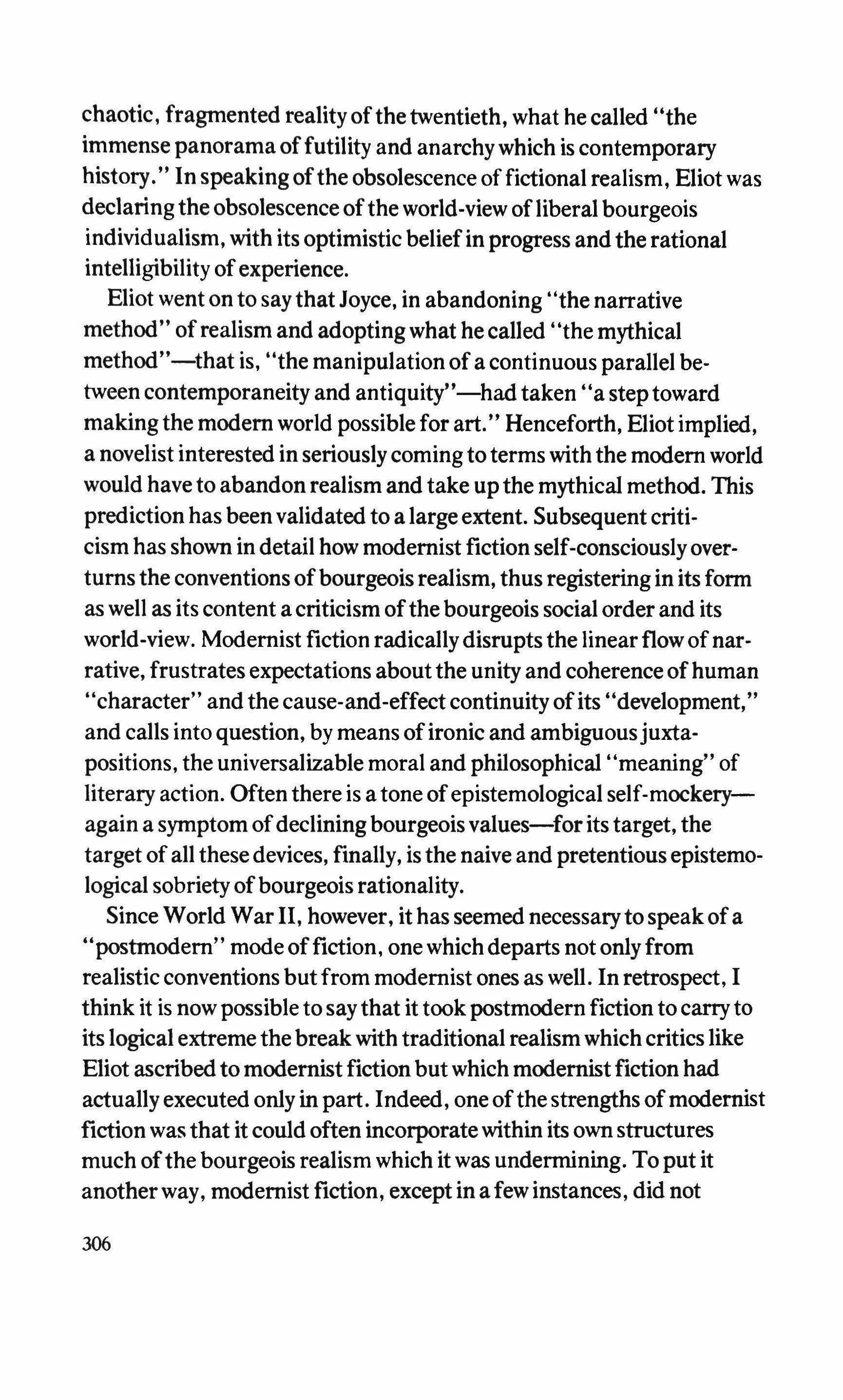
chaotic, fragmented reality ofthe twentieth, what he called "the immense panorama offutility and anarchywhich is contemporary history." In speaking ofthe obsolescence offictional realism, Eliot was declaringthe obsolescenceofthe world-view ofliberal bourgeois individualism, with its optimistic beliefin progress and the rational intelligibility ofexperience.
Eliot went on to saythat Joyce, in abandoning "the narrative method" ofrealism and adoptingwhat he called''the mythical method"-that is, "the manipulation of a continuous parallel between contemporaneity and antiquity"-had taken "a steptoward making the modem world possible for art." Henceforth, Eliot implied, a novelist interested in seriouslycoming to terms with the modem world would have to abandon realism and take upthe mythical method. This prediction has been validated to a large extent. Subsequent criticism has shown in detail how modernist fiction self-consciously overturns the conventionsofbourgeoisrealism, thus registeringin its form as well as its content a criticism ofthe bourgeois social order and its world-view. Modernist fiction radicallydisrupts the linearflow ofnarrative, frustrates expectations aboutthe unity and coherence ofhuman "character" and the cause-and-effect continuityofits "development," and calls into question, by means ofironic and ambiguousjuxtapositions, the universalizable moral and philosophical "meaning" of literary action. Often there is a tone ofepistemological self-mockeryagain a symptom ofdecliningbourgeoisvalues-for its target, the target ofall these devices, finally, is the naive and pretentiousepistemological sobriety ofbourgeoisrationality.
Since World War II, however, ithas seemed necessaryto speakof a "postmodern" mode offiction, one which departs not onlyfrom realistic conventions but from modernist ones as well. In retrospect, I think it is now possible to saythat it tookpostmodern fiction to carry to its logical extreme thebreak with traditional realismwhich critics like Eliot ascribed to modernist fictionbutwhich modernist fiction had actually executed only in part. Indeed, one ofthe strengths ofmodernist fiction was that it could often incorporatewithin its own structures much ofthe bourgeois realism which it was undermining. To put it anotherway, modernist fiction, except in a fewinstances, did not
306
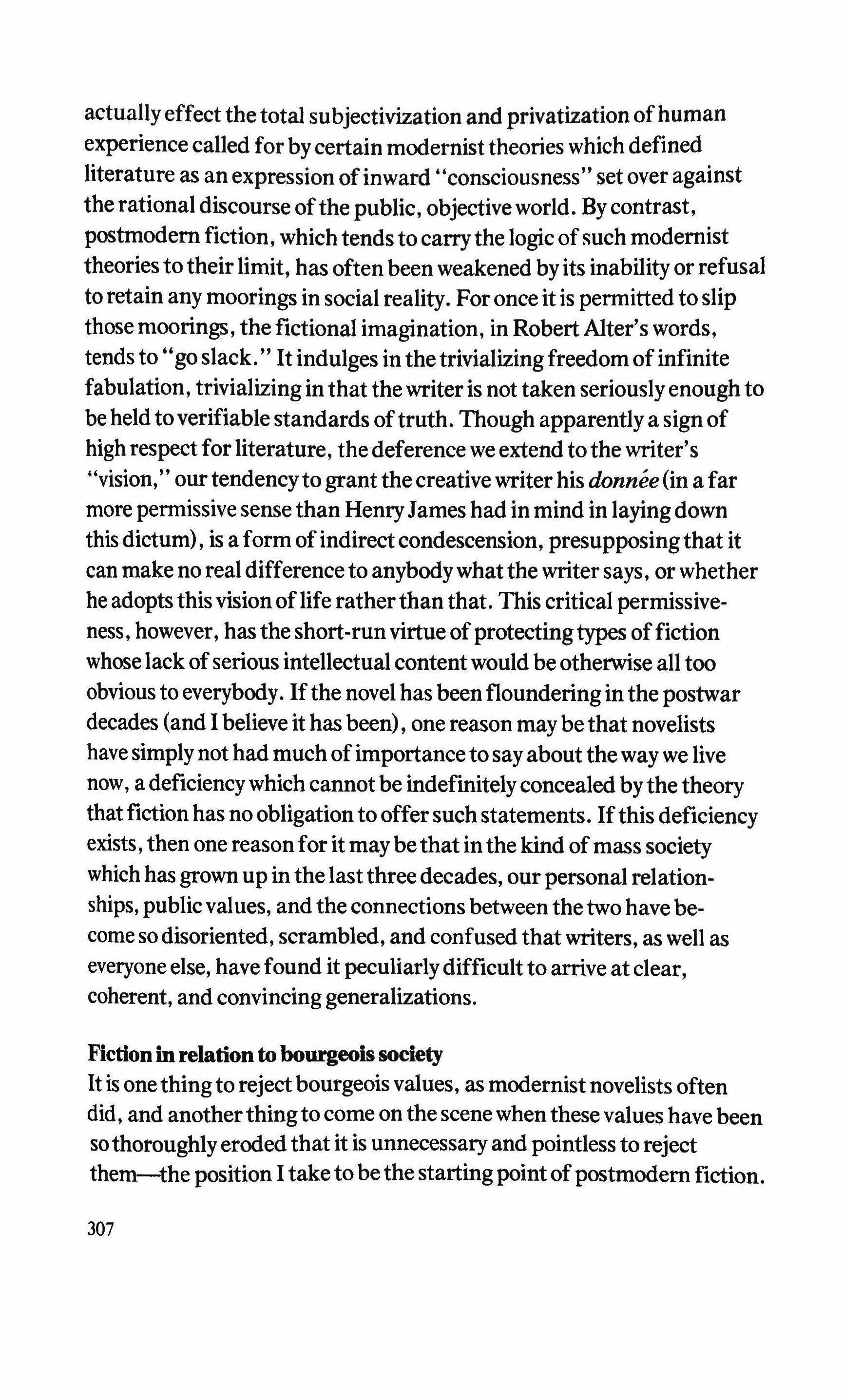
actuallyeffect thetotal subjectivization and privatization ofhuman experience called for bycertain modernist theories which defined literature as an expression ofinward "consciousness" set over against the rational discourse ofthe public, objective world. By contrast, postmodern fiction, which tends to carrythe logic ofsuch modernist theories totheirlimit, has often been weakened byits inability or refusal to retain any moorings in social reality. For once it is permitted to slip those moorings, the fictional imagination, in Robert Alter's words, tendsto"go slack." It indulges in thetrivializingfreedomofinfinite fabulation, trivializing in that thewriteris not taken seriouslyenough to beheld toverifiable standards oftruth. Though apparently a sign of high respect for literature, the deference we extend to the writer's "vision," our tendencyto grantthecreative writer his donnee(in a far more permissive sense than HenryJames had in mind in layingdown this dictum), is a form ofindirectcondescension, presupposingthat it can make no real difference to anybodywhatthe writer says, or whether he adoptsthis visionoflife ratherthan that. This critical permissiveness, however, has the short-run virtue ofprotectingtypes offiction whoselack ofserious intellectual content would be otherwise all too obvious to everybody. Ifthe novel has been floundering in the postwar decades (and I believe it has been), one reason may bethat novelists have simply not had much ofimportance to sayabouttheway we live now, a deficiencywhich cannot be indefinitelyconcealed bythe theory thatfiction has no obligation to offer such statements. Ifthis deficiency exists, then one reason for it maybethat inthe kind of mass society which has grown up in the last three decades, our personal relationships, public values, and the connections between thetwo have become so disoriented, scrambled, and confused that writers, as well as everyone else, have found it peculiarlydifficult to arrive at clear, coherent, and convincinggeneralizations.
Fiction inrelation to bourgeoissociety
It is one thing to rejectbourgeoisvalues, as modernistnovelists often did, and anotherthingto come on the scene when thesevalues have been so thoroughlyeroded that it is unnecessaryand pointless to reject them-the position I take tobethe startingpoint of postmodern fiction.
307
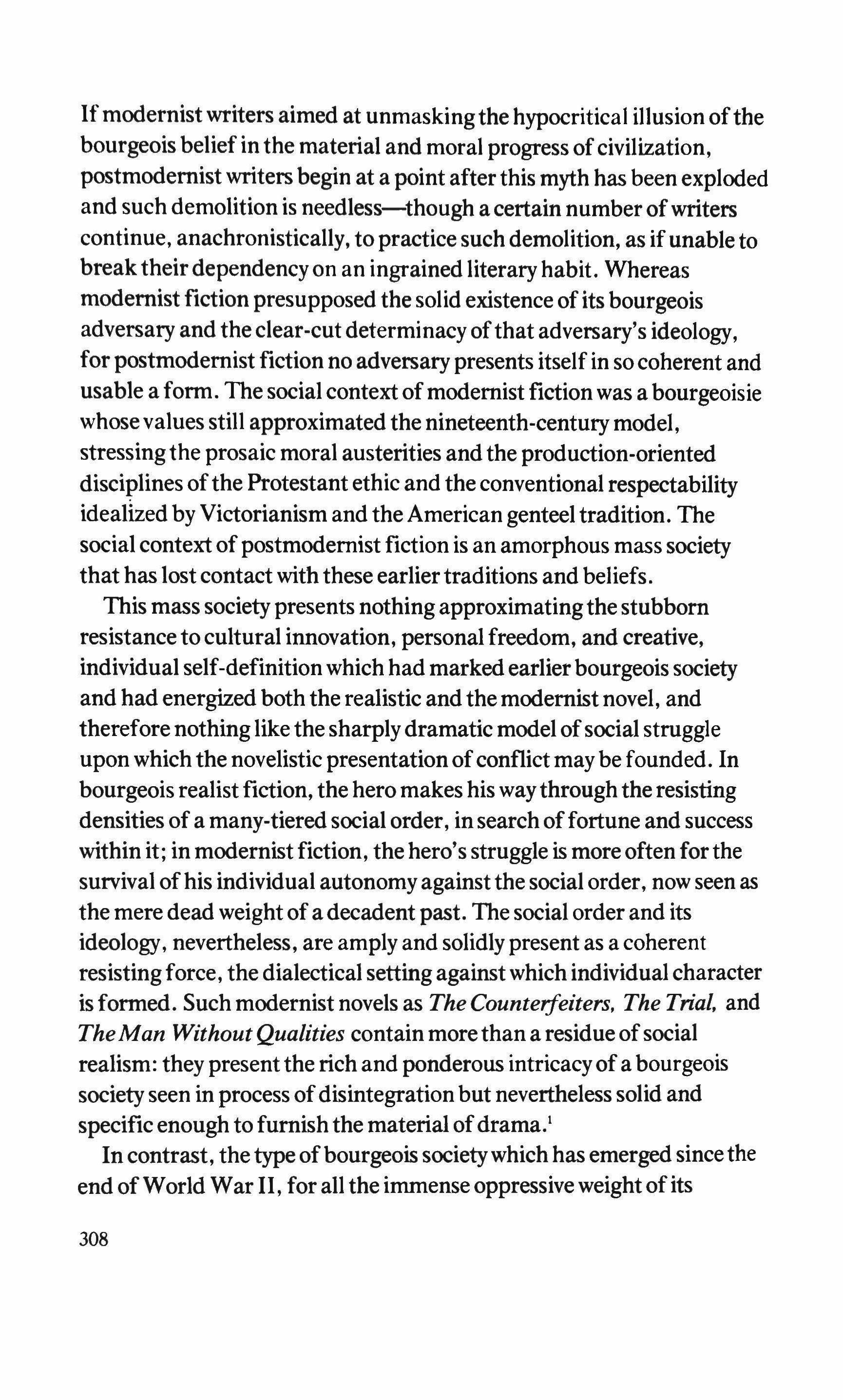
Ifmodernist writers aimed at unmaskingthe hypocritical illusion ofthe bourgeois belief in the material and moral progress ofcivilization, postmodernist writers begin at a point after this myth has been exploded and such demolition is needless-though a certain number ofwriters continue, anachronistically, to practice such demolition, as if unable to break theirdependency on an ingrainedliterary habit. Whereas modernist fiction presupposed the solid existence ofits bourgeois adversary and the clear-cut determinacy ofthat adversary's ideology, for postmodernist fiction no adversarypresents itself in so coherent and usable a form. The social context of modernist fiction was a bourgeoisie whose values still approximated the nineteenth-centurymodel, stressingthe prosaic moral austerities and the production-oriented disciplines ofthe Protestant ethic and the conventional respectability idealizedby Victorianism and the American genteel tradition. The social context ofpostmodernist fiction is an amorphous mass society that has lost contact with these earliertraditions and beliefs.
This mass societypresents nothingapproximatingthe stubborn resistance to cultural innovation, personalfreedom, and creative, individual self-definition which had marked earlierbourgeoissociety and had energized both the realistic and themodernist novel, and therefore nothing like the sharplydramatic model ofsocial struggle upon which the novelistic presentationofconflict may be founded. In bourgeois realist fiction, the hero makes his waythrough the resisting densities of a many-tiered social order, insearch offortune and success within it; in modernist fiction, the hero's struggle is more often forthe survival ofhis individual autonomyagainstthe social order, now seen as the mere dead weight of a decadent past. The social order and its ideology, nevertheless, are amply and solidlypresent as a coherent resistingforce, the dialectical settingagainstwhich individual character is formed. Such modernist novels as The Counterfeiters, The Trial, and TheMan WithoutQualities contain more than a residue ofsocial realism: they present the rich and ponderous intricacyof a bourgeois society seen in process ofdisintegration but nevertheless solid and specificenough to furnish the material ofdrama.'
In contrast, the type ofbourgeoissocietywhich has emerged since the end ofWorld War II, for all the immense oppressiveweightofits
308
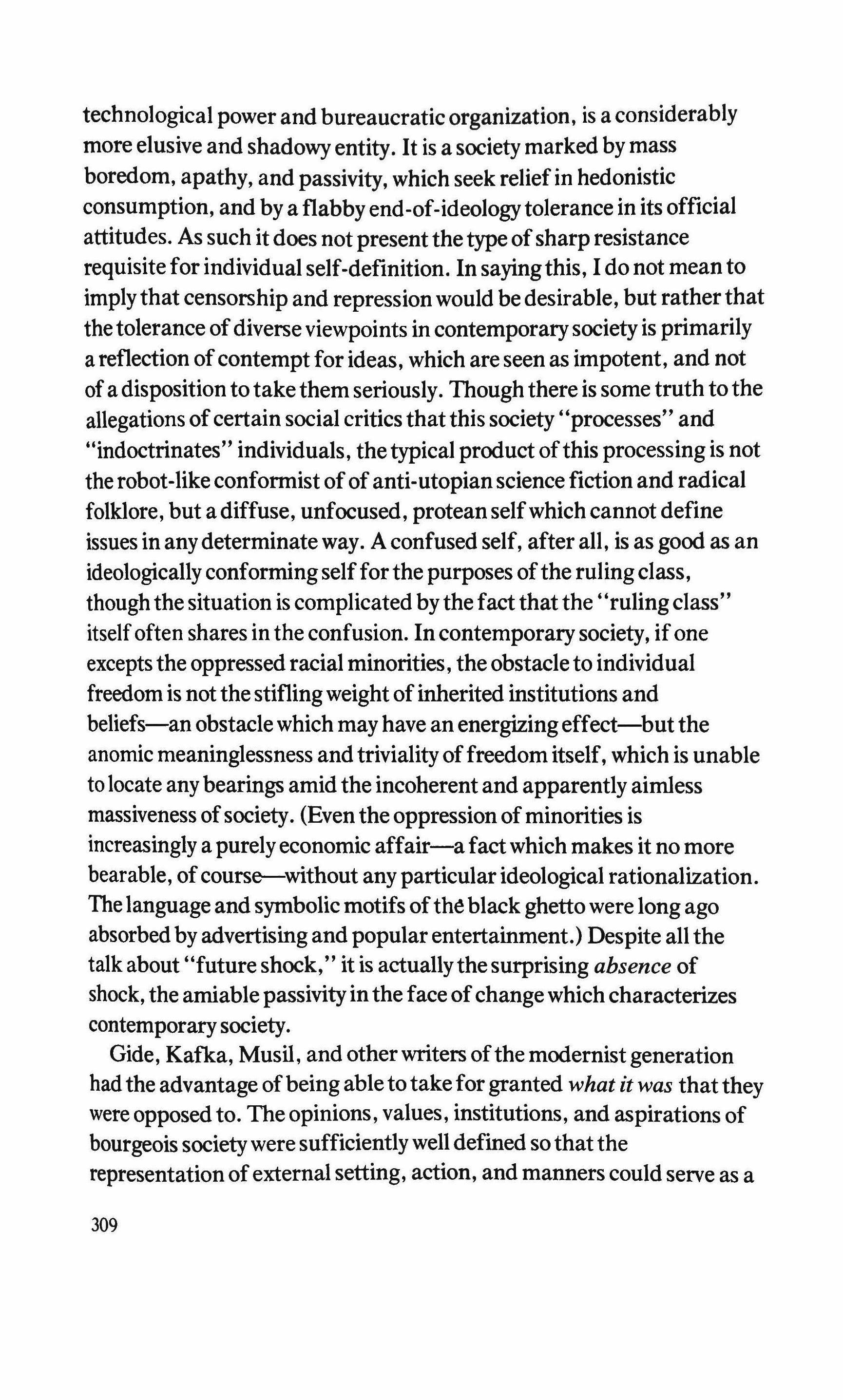
technological power and bureaucratic organization, is a considerably more elusive and shadowyentity. It is a society marked by mass boredom, apathy, and passivity, which seek reliefin hedonistic consumption, and by a flabbyend-of-ideologytolerance in its official attitudes. As such itdoes not presentthetype ofsharp resistance requisite for individual self-definition. In sayingthis, I do not mean to implythat censorship and repression would be desirable, but ratherthat thetolerance ofdiverseviewpoints in contemporarysocietyis primarily a reflection ofcontempt for ideas, which are seen as impotent, and not of a disposition to takethem seriously. Though there is some truth to the allegations ofcertain social critics thatthis society"processes" and "indoctrinates" individuals, thetypical product ofthis processing is not therobot-like conformist ofofanti-utopianscience fiction and radical folklore, but a diffuse, unfocused, proteanselfwhich cannot define issues in anydeterminate way. A confused self, after all, is as good as an ideologicallyconformingselfforthe purposes ofthe rulingclass, thoughthe situation is complicatedbythe fact thatthe "rulingclass" itselfoften shares inthe confusion. In contemporarysociety, if one exceptsthe oppressed racial minorities, the obstacle to individual freedom is not thestiflingweight ofinherited institutions and beliefs-an obstaclewhich mayhave an energizingeffect-butthe anomie meaninglessness andtrivialityoffreedom itself, which is unable tolocate any bearings amid the incoherent and apparently aimless massiveness ofsociety. (Even the oppression ofminorities is increasingly a purelyeconomic affair-afactwhich makes it no more bearable, ofcourse-without any particularideological rationalization. Thelanguage and symbolic motifs oftheblack ghetto were long ago absorbed byadvertising and popular entertainment.) Despite all the talk about "future shock," it is actuallythesurprising absence of shock, the amiable passivity inthe face ofchangewhich characterizes contemporarysociety.
Gide, Kafka, Musil, and other writers ofthe modernist generation hadthe advantage ofbeing ableto takeforgranted what it was thatthey were opposed to. The opinions, values, institutions, and aspirations of bourgeoissociety were sufficientlywelldefined so that the representationofexternal setting, action, and manners could serve as a
309
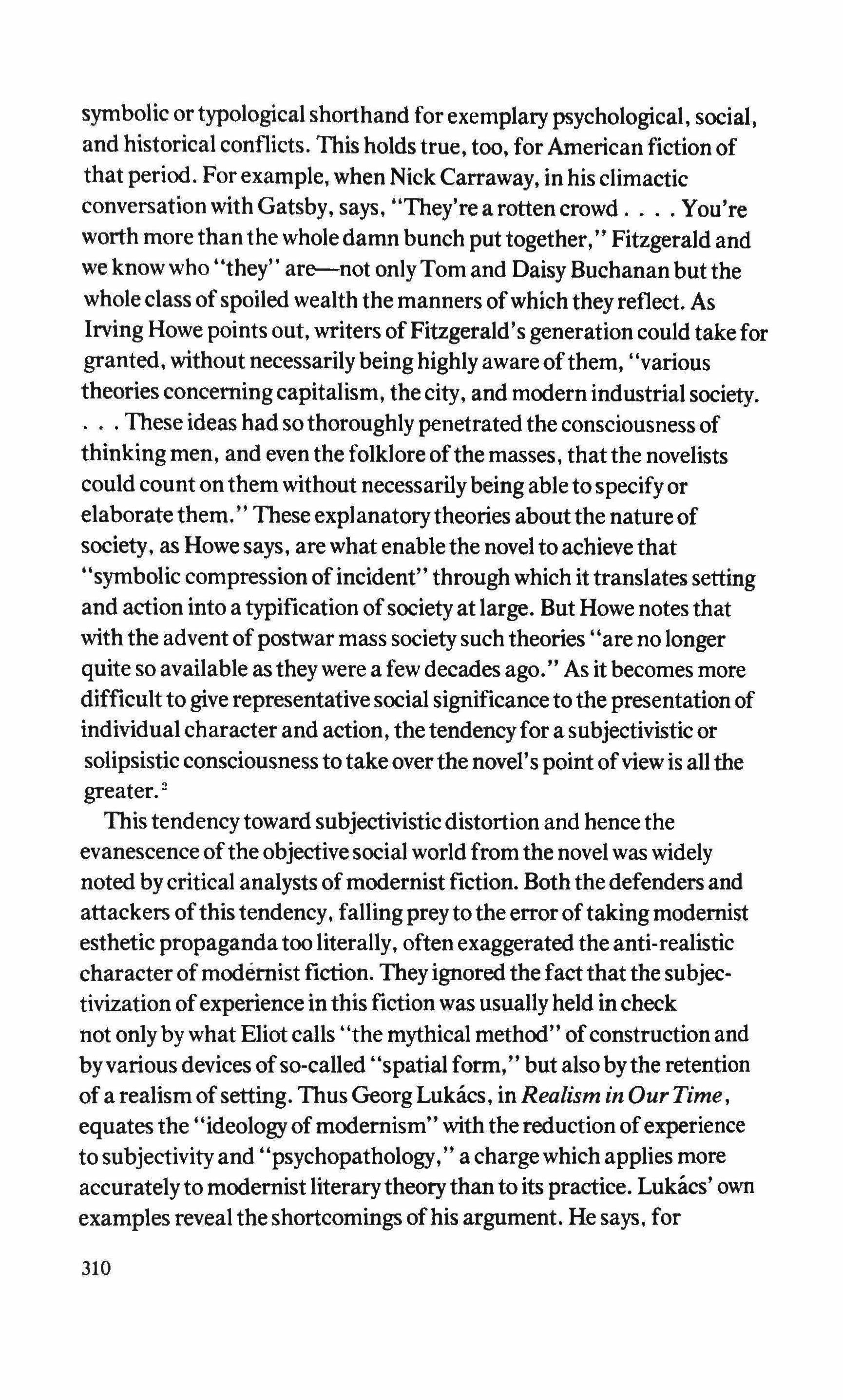
symbolic or typological shorthand for exemplarypsychological, social, and historical conflicts. This holds true, too, for American fiction of that period. For example, when Nick Carraway, in his climactic conversation with Gatsby, says, "They're a rotten crowd. You're worth more than the whole damn bunch puttogether," Fitzgerald and we know who "they" are--not onlyTom and Daisy Buchanan but the whole class ofspoiled wealth the manners ofwhich theyreflect. As Irving Howe points out, writers ofFitzgerald'sgeneration could take for granted, without necessarilybeinghighly aware ofthem, "various theories concerningcapitalism, the city, and modern industrial society. These ideas had so thoroughlypenetrated the consciousness of thinking men, and even the folklore ofthe masses, that the novelists could count on them without necessarilybeing able to specify or elaborate them." These explanatorytheories aboutthe nature of society, as Howe says, are what enable the novel to achieve that "symbolic compression ofincident" through which it translates setting and action into a typification ofsociety at large. But Howe notes that with the advent ofpostwar mass society such theories" are no longer quite so available as they were a few decades ago." As it becomes more difficult to giverepresentative social significance to the presentation of individual character and action, the tendencyfor a SUbjectivistic or solipsistic consciousness to take over the novel's point ofviewis all the greater. 2
This tendencytoward subjectivistic distortion and hence the evanescence ofthe objectivesocial world from the novel was widely noted bycritical analysts ofmodernist fiction. Both thedefenders and attackers ofthis tendency, falling preyto the error oftakingmodernist esthetic propaganda too literally, often exaggerated the anti-realistic character ofmodernist fiction. Theyignored the factthat the subjectivization ofexperience inthis fiction was usuallyheld in check not onlybywhat Eliot calls''the mythical method" ofconstruction and byvarious devices ofso-called "spatial form," but alsobythe retention of a realism ofsetting. Thus GeorgLukacs, in Realism in Our Time, equates the "ideologyof modernism" withthe reduction ofexperience to SUbjectivity and''psychopathology," a charge which applies more accuratelyto modernist literarytheorythan to its practice. Lukacs' own examples reveal the shortcomings ofhis argument. He says, for 310
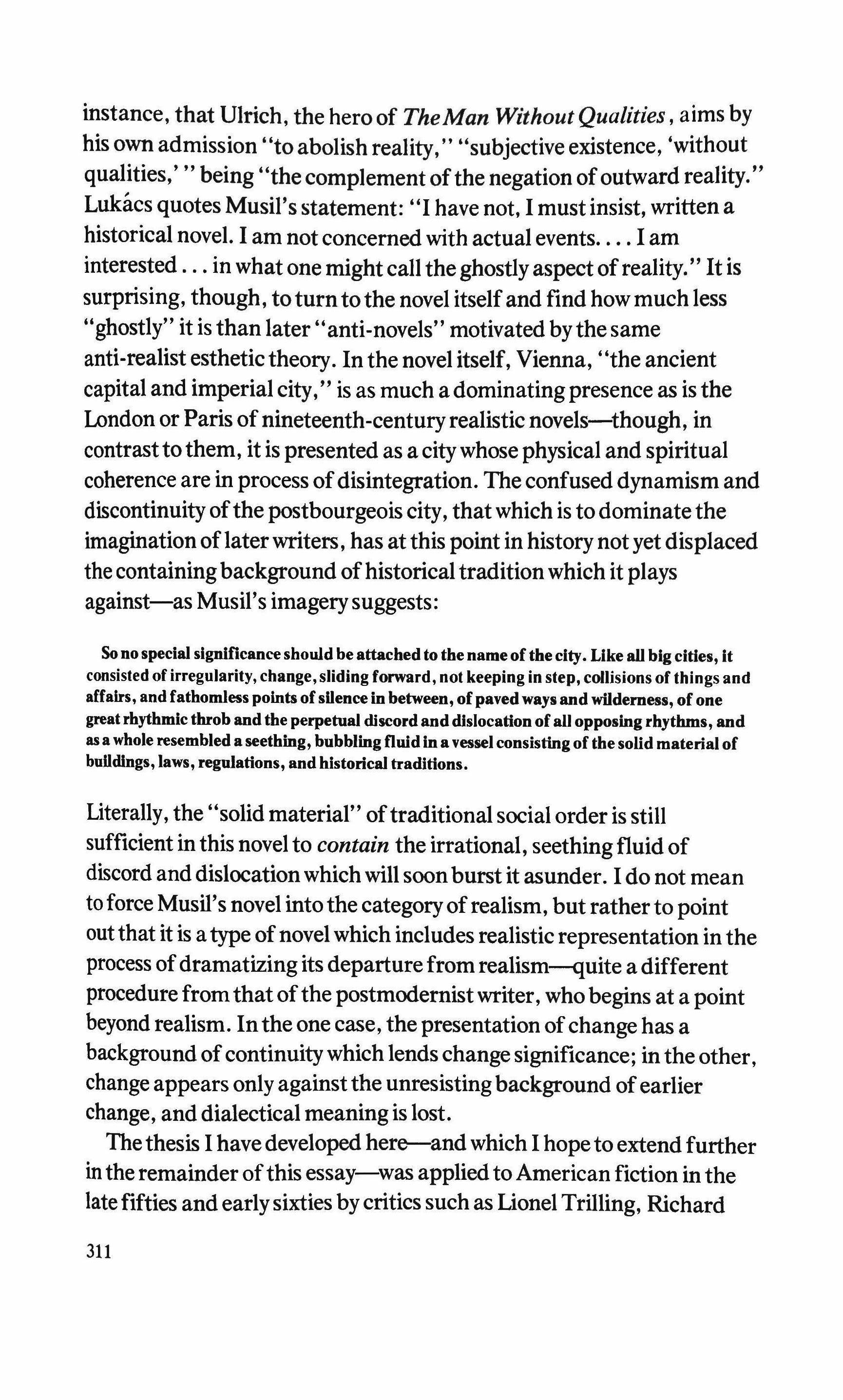
instance, that Ulrich, the hero of TheMan Without Qualities ,aims by his own admission "to abolish reality," "subjective existence, 'without qualities,' being "the complement ofthe negation ofoutward reality." Lukacs quotes Musil's statement: "I have not, I must insist, written a historical novel. I am not concerned with actual events I am interested in what one might call the ghostlyaspect ofreality." It is surprising, though, to turntothe novel itselfand find how much less "ghostly" it is than later "anti-novels" motivated bythe same anti-realist esthetictheory. In the novel itself, Vienna, "the ancient capital and imperialcity," is as much a dominatingpresence as is the London or Paris ofnineteenth-centuryrealistic novels-though, in contrast to them, it is presented as a city whose physical and spiritual coherence are in process ofdisintegration. The confused dynamism and discontinuity ofthe postbourgeoiscity, thatwhich is to dominate the imagination oflater writers, has at this point in history not yet displaced the containingbackground ofhistoricaltraditionwhich it plays against-as Musil's imagerysuggests:
So no special significance should be attached to the name of the city. Like aU big cities, it consisted of irregularity, change,sliding forward, not keeping in step, collisions of things and affairs, and fathomless points of sUence in between, of paved ways and wilderness, of one greatrhythmic throb and the perpetual discord and dislocation of all opposingrhythms, and as a whole resembled a seething, bubbling flald In a vessel consisdng of the solid material of bulldlngs, laws, regulations, and historical traditions.
Literally, the "solid material" oftraditional social order is still sufficient in this novel to contain the irrational, seethingfluid of discord and dislocation which will soon burst it asunder. I do not mean to force Musil's novel intothe category ofrealism, but rather to point out that it is a type of novel which includes realistic representation in the process ofdramatizing its departure from realism-quite a different procedure fromthatofthe postmodernistwriter, who begins at a point beyond realism. In the one case, the presentation of change has a background ofcontinuity which lends changesignificance; inthe other, change appears onlyagainstthe unresistingbackground ofearlier change, and dialectical meaning is lost.
Thethesis I havedeveloped here-=and which I hopeto extend further inthe remainder ofthis essay-was applied to American fiction in the late fifties and earlysixties by critics such as Lionel Trilling, Richard
311
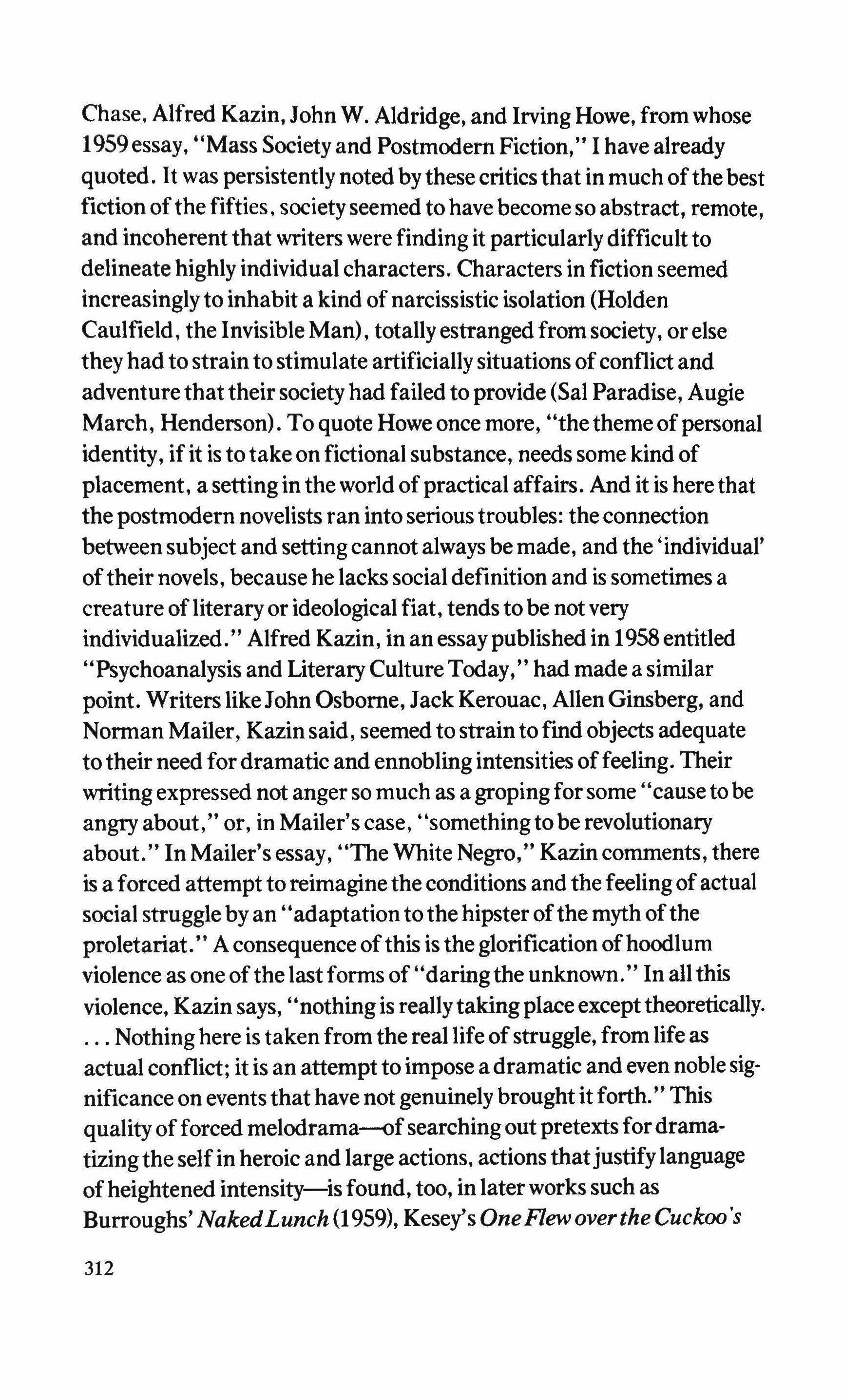
Chase, Alfred Kazin, John W. Aldridge, and Irving Howe, from whose 1959essay, "Mass Society and Postmodern Fiction," I have already quoted. It was persistently noted bythese critics that in much ofthebest fiction ofthe fifties, societyseemed to have become so abstract, remote, and incoherent that writers were finding it particularly difficult to delineate highly individual characters. Characters in fiction seemed increasingly to inhabit a kind ofnarcissistic isolation (Holden Caulfield, the Invisible Man), totallyestranged fromsociety, or else theyhad to strain to stimulate artificiallysituations ofconflict and adventure thattheir society had failed to provide (Sal Paradise, Augie March, Henderson). To quote Howe once more, "thetheme of personal identity, ifit is to take on fictional substance, needs some kind of placement, a settingin theworld ofpractical affairs. And it is herethat the postmodern novelists ran into serious troubles: theconnection between subject and setting cannot always be made, and the 'individual' oftheir novels, because he lacks social definition and is sometimes a creature ofliterary or ideological fiat, tends to be not very individualized." Alfred Kazin, in an essaypublished in 1958 entitled "Psychoanalysis and Literary Culture Today," had made a similar point. Writers likeJohn Osborne, Jack Kerouac, Allen Ginsberg, and Norman Mailer, Kazinsaid, seemed to strain to fmd objects adequate to their need fordramatic and ennobling intensities offeeling. Their writingexpressed not anger so much as a gropingfor some "cause to be angry about," or, in Mailer's case, "something to be revolutionary about." In Mailer's essay, "The White Negro," Kazin comments, there is a forced attempt to reimaginethe conditions and the feelingofactual social struggleby an "adaptation tothe hipster ofthe myth ofthe proletariat." A consequence ofthis is the glorification ofhoodlum violence as one ofthe last forms of"daringthe unknown. " In all this violence, Kazin says, "nothing is reallytakingplaceexcepttheoretically Nothing here is taken from the real life ofstruggle, from life as actual conflict; it is an attempt to impose a dramatic and even noble significance on events that have not genuinelybrought itforth." This qualityofforced melodrama-ofsearching out pretexts fordramatizingthe selfin heroic and large actions, actions thatjustifylanguage ofheightenedintensity-isfound, too, in laterworks such as Burroughs' NakedLunch (1959), Kesey's OneFlew over the Cuckoo's
312
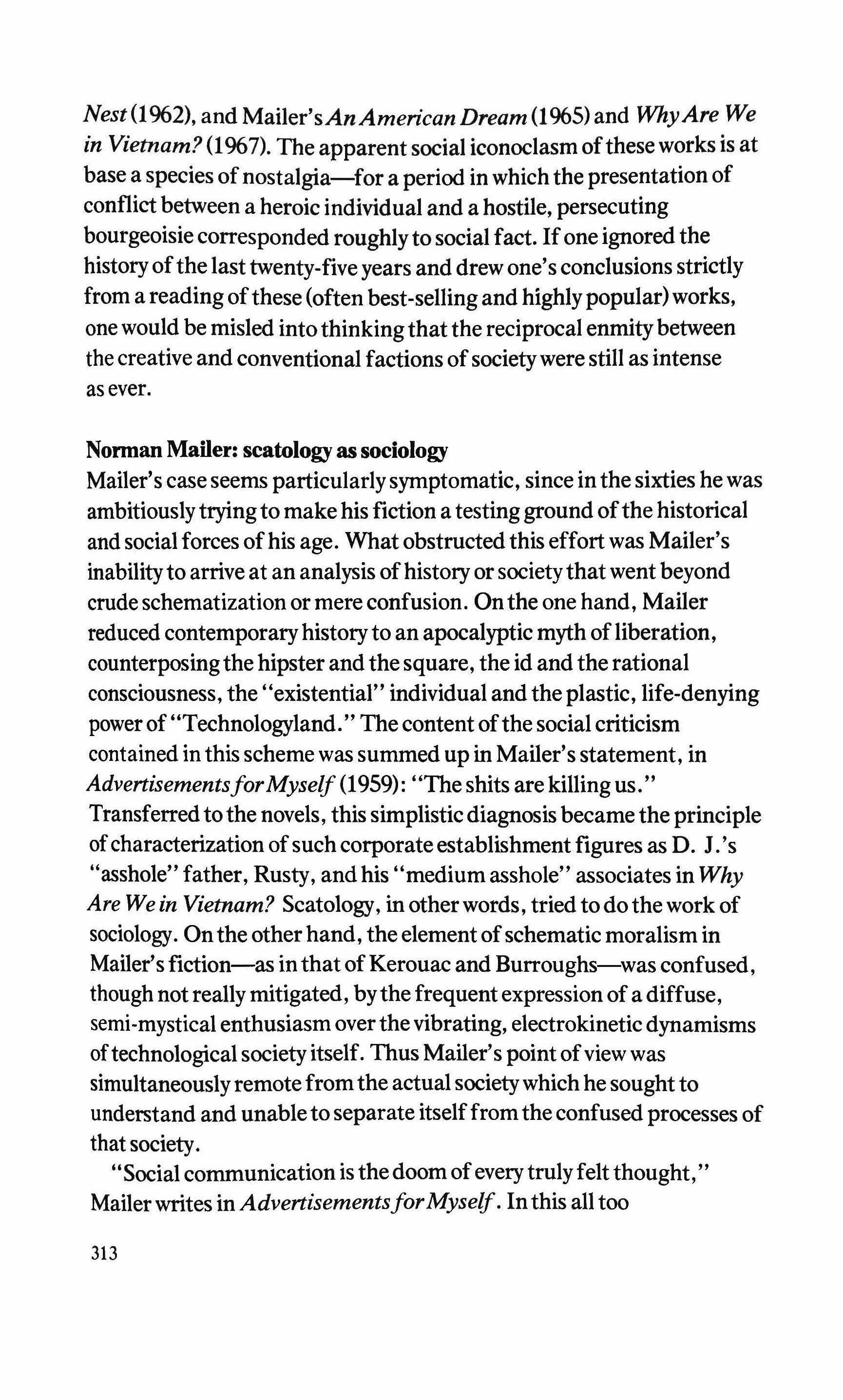
Nest(1962), and Mailer'sAnAmerican Dream (1965) and WhyAre We in Vietnam?(1967). The apparent social iconoclasm ofthese works is at base a species ofnostalgia-for a period in which the presentation of conflict between a heroic individual and a hostile, persecuting bourgeoisiecorresponded roughly to social fact. If one ignored the history ofthe last twenty-five years and drew one's conclusions strictly from a reading ofthese (often best-sellingand highlypopular)works, one would be misled intothinkingthat the reciprocalenmitybetween the creative and conventional factions ofsociety were still as intense as ever.
Nonnan Maller: scatology as sociology
Mailer's case seems particularlysymptomatic, since inthe sixties he was ambitiouslytryingto make his fiction a testingground ofthe historical and social forces ofhis age. What obstructed this effort was Mailer's inabilityto arrive at an analysis ofhistory or societythat went beyond crude schematization or mere confusion. Onthe one hand, Mailer reduced contemporaryhistory to an apocalypticmyth ofliberation, counterposingthe hipster and thesquare, the id and the rational consciousness, the "existential" individual and the plastic, life-denying power of "Technologyland." The content ofthe social criticism contained in this scheme was summed up in Mailer's statement, in AdvertisementsforMyself(1959): "The shits are killing us."
Transferred tothe novels, this simplisticdiagnosis became the principle ofcharacterization ofsuch corporate establishment figures as D. J.'s "asshole" father, Rusty, and his "medium asshole" associates in Why Are We in Vietnam? Scatology, in otherwords, tried to do the work of sociology. Onthe other hand, theelement ofschematic moralism in Mailer's fiction-as in that of Kerouac and Burroughs-was confused, though not reallymitigated, bythe frequentexpression of a diffuse, semi-mystical enthusiasm over thevibrating, electrokineticdynamisms oftechnologicalsociety itself. Thus Mailer's point ofview was simultaneouslyremote fromthe actual societywhich he sought to understand and unableto separate itselffromtheconfused processes of thatsociety.
"Social communication is the doom ofevery trulyfeltthought," Mailer writes in AdvertisementsforMyself. Inthis all too
313
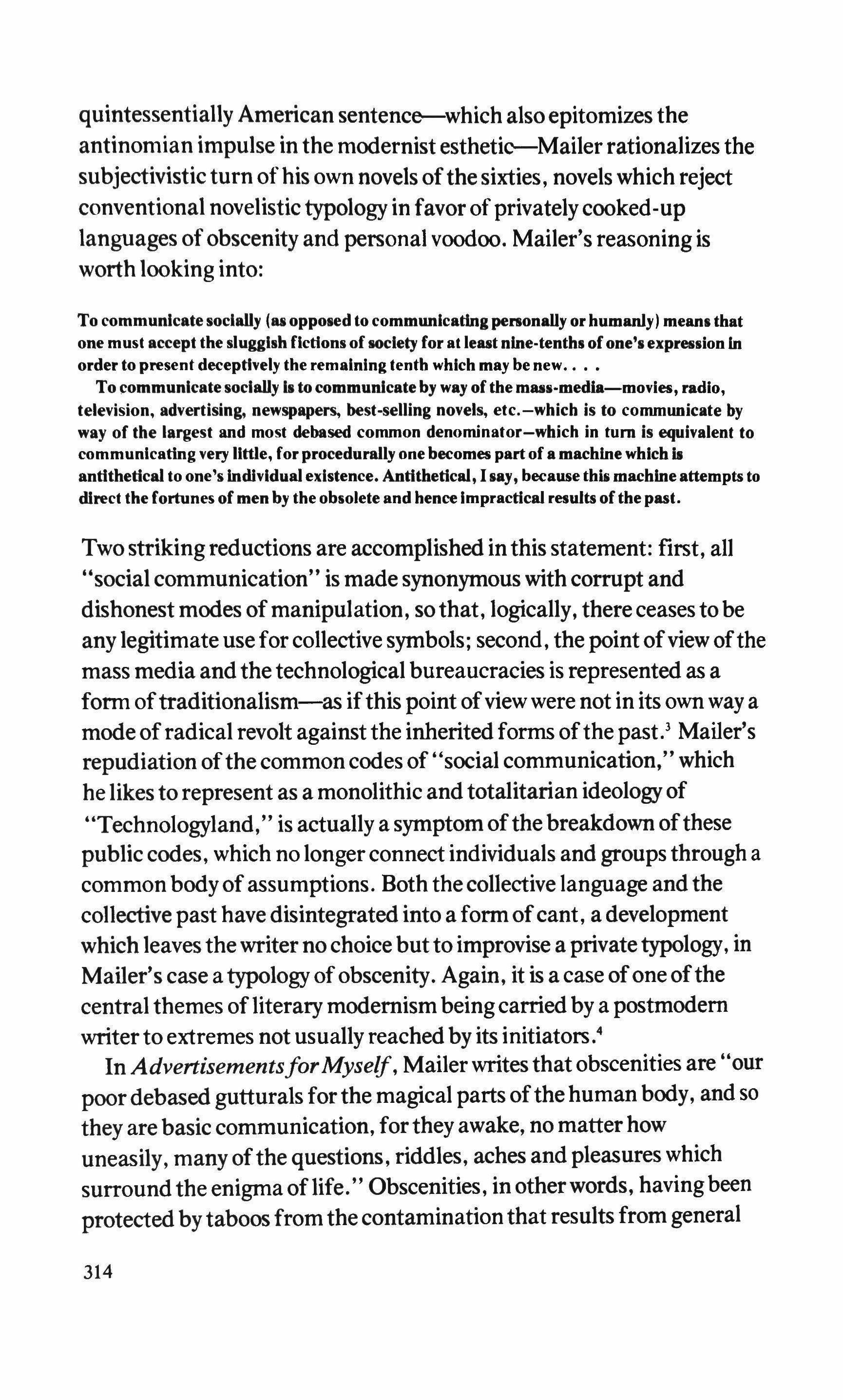
quintessentially American sentence--which alsoepitomizes the antinomian impulse in the modernist esthetic-Mailer rationalizes the subjectivistic turn ofhis own novels ofthe sixties, novels which reject conventional novelistic typology in favor ofprivatelycooked-up languages ofobscenity and personal voodoo. Mailer's reasoning is worth looking into:
To communicate socially (aseppesed to communicatingpenonally or humanly) mean. that one must accept the sluggish fictions of IOClety for at least nine-tenths of one'. expression In order to present deceptively the remaining tenth which may be new
To communicate socially Is to communicate by way of the masll-medla-movies, radio, television, advertising, newspapers, best-selling novels, etc.-which is to communicate by way of the largest and most debased common denominator-which in tum is equivalent to communicating very little, for procedurally one becomes part of a machine which Is antithetical to one's individual existence. Antithetical, I say, because thli machine attempts to direct the fortunes of men by the obsolete and hence Impractical results ofthe past.
Two striking reductions are accomplished inthis statement: first, all "social communication" is made synonymous with corrupt and dishonest modes ofmanipulation, so that, logically, there ceases to be any legitimate use for collective symbols; second, the point ofview ofthe mass media and the technological bureaucracies is represented as a form oftraditionalism-as ifthis point ofview were not in its own way a mode ofradical revolt against the inherited forms ofthe past.' Mailer's repudiation ofthe common codes of "social communication," which he likes to represent as a monolithic and totalitarian ideologyof "Technologyland," is actually a symptom ofthe breakdown ofthese public codes, which no longer connect individuals and groups through a common body ofassumptions. Both thecollective language and the collective past have disintegrated into a form ofcant, a development which leaves thewriter no choice but to improvise a privatetypology, in Mailer's case a typology ofobscenity. Again, it is a case of one ofthe central themes ofliterary modernism beingcarried by a postmodem writer to extremes not usually reachedby its initiators,"
In AdvertisementsforMyself, Mailerwrites that obscenities are "our poordebased gutturals forthe magical parts ofthehuman body, and so they are basic communication, fortheyawake, no matter how uneasily, many ofthe questions, riddles, aches and pleasures which surround the enigma oflife." Obscenities, in otherwords, havingbeen protectedbytaboos fromthe contaminationthat results from general
314
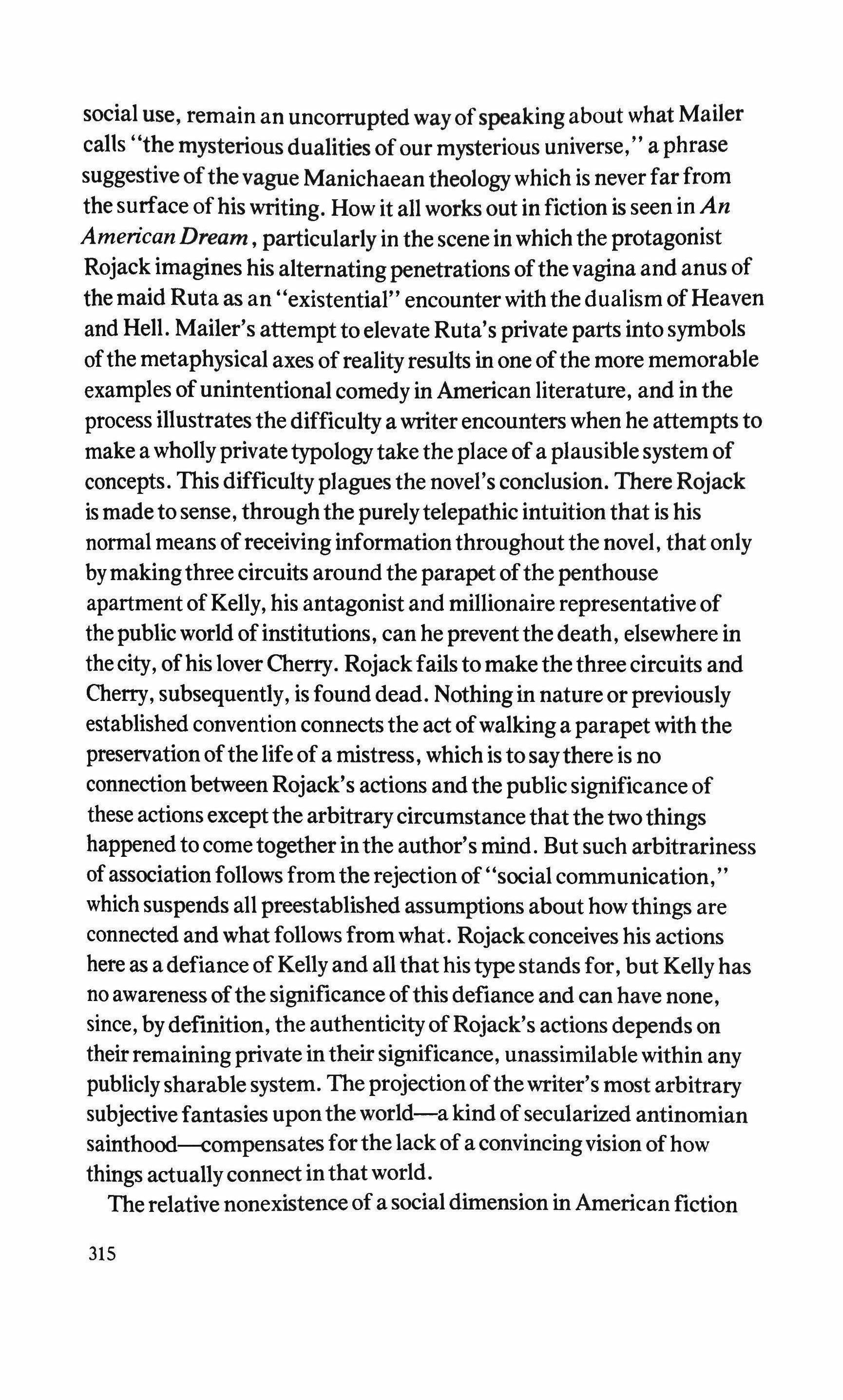
social use, remain an uncorrupted way ofspeaking about what Mailer calls''the mysterious dualities of our mysterious universe," a phrase suggestive ofthevague Manichaeantheologywhich is never farfrom the surface of his writing. How it all works out in fiction is seen in An AmericanDream, particularly in the scene in whichthe protagonist Rojackimagines his alternatingpenetrations ofthevagina and anus of the maid Ruta as an "existential" encounter with the dualism ofHeaven and Hell. Mailer's attempt to elevate Ruta's private parts into symbols ofthe metaphysical axes of reality results in one ofthe more memorable examples ofunintentional comedy in American literature, and in the process illustrates the difficulty a writer encounters when he attempts to make a whollyprivatetypology take the place of a plausible system of concepts. This difficultyplagues the novel's conclusion. There Rojack is made to sense, through the purelytelepathic intuition that is his normal means ofreceiving informationthroughout the novel, that only bymakingthree circuits around the parapet ofthe penthouse apartment ofKelly, his antagonist and millionaire representative of thepublic world ofinstitutions, can he prevent the death, elsewhere in thecity, ofhis loverCherry. Rojackfails to make the three circuits and Cherry, subsequently, is found dead. Nothing in nature or previously established convention connects the act ofwalking a parapet with the preservationofthe life of a mistress, which is to saythere is no connectionbetween Rojack's actions and the publicsignificance of these actions exceptthe arbitrarycircumstancethatthe two things happened to come together inthe author's mind. But such arbitrariness of associationfollows from the rejection of "social communication," which suspends all preestablishedassumptions about howthings are connected and what follows from what. Rojackconceives his actions here as a defiance of Kelly and all that his type stands for, but Kelly has no awareness ofthe significance ofthis defiance and can have none, since, bydefinition, the authenticityof Rojack's actions depends on their remainingprivate intheir significance, unassimilable within any publiclysharable system. The projectionofthewriter's most arbitrary subjective fantasies uponthe world-a kind of secularized antinomian sainthood---compensates forthe lack of a convincing vision of how things actuallyconnect inthat world. The relative nonexistence of a social dimension in American fiction
315
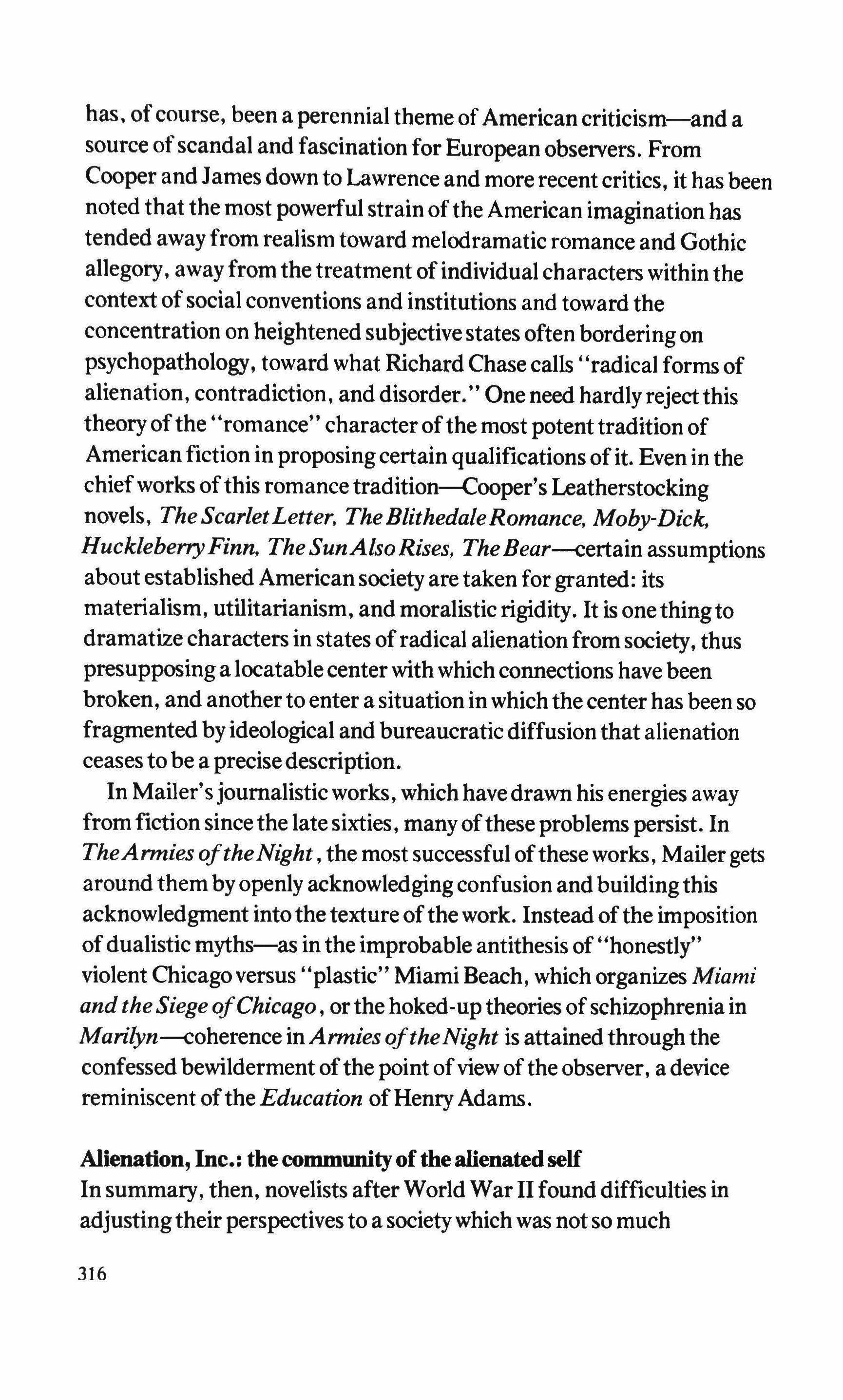
has. ofcourse, been a perennial theme ofAmericancriticism-and a source ofscandal and fascination for European observers. From Cooper and James down to Lawrence and more recent critics, it has been noted that the most powerful strain ofthe American imagination has tended away from realism toward melodramatic romance and Gothic allegory, away from the treatment ofindividual characters within the context ofsocial conventions and institutions and toward the concentration on heightened subjective states often bordering on psychopathology, toward what Richard Chase calls''radical forms of alienation. contradiction, and disorder." One need hardlyreject this theory ofthe''romance" character ofthe most potenttradition of American fiction in proposing certain qualifications of it. Even in the chiefworks ofthis romance tradition-Cooper's Leatherstocking novels, TheScarletLetter. TheBlithedaleRomance. Moby-Dick. HuckleberryFinn, TheSunAlsoRises, TheBear�ertain assumptions about established American society are taken for granted: its materialism, utilitarianism, and moralistic rigidity. It is one thingto dramatize characters in states ofradical alienation from society, thus presupposing a locatable center with which connections have been broken, and another to enter a situation in which the center has been so fragmentedbyideological and bureaucratic diffusionthat alienation ceases to be a precisedescription.
In Mailer's journalisticworks, which havedrawn his energies away from fiction since the late sixties, many ofthese problems persist. In TheArmies oftheNight, the most successful ofthese works, Mailergets around them byopenlyacknowledgingconfusion and buildingthis acknowledgment intothe texture ofthe work. Instead ofthe imposition ofdualistic myths-as in the improbable antithesis of "honestly" violent Chicago versus "plastic" Miami Beach, which organizes Miami and theSiegeofChicago, or the hokedup theories ofschizophrenia in Marilyn�oherence inArmies oftheNight is attained through the confessed bewilderment ofthe point ofview of the observer, a device reminiscent ofthe Education ofHenry Adams.
Alienation, Inc.: the communityofthealienated self
In summary, then, novelists after World War II found difficulties in adjustingtheir perspectives to a societywhich was not so much
316

antagonistic to their visions as bored and indifferent, a diffuse, protean, blandlyyielding mass society whose often maddening complacency concealed its uncertainty about its beliefs and its apprehensions about its future. Bythe beginningofthe sixties, however, a new phase ofdevelopment had begun: the passivity and anomie loneliness ofthe fifties had crystallized, become something more self-conscious and, in some respects, more defined and distinct. To be lonely in the fifties-as those who came to maturity in the decade will recall-meant merelyto suffer from a personalproblem. In the sixties, though, to be lonely meant being" alienated." This constituted a liberating advance in one respect, for the discoverythat one's problems couldbetraced to deficiencies inthe social process might alleviate much ofone's personal guilt and prepare the wayfor positive action. But the new self-consciousness about one's alienation, "growing up absurd," and so forth, could alsotake unattractive forms, forms which invested alienation with an element ofself-dramatization or even selfcongratulation. The honest pathos ofthe genuine sufferer mightgive way to the stridenttheatrics ofthe professional victim. In the fifties, thoughsociological writers mightdescribedisaffiliated youths ofthe period as a LonelyCrowd, the actual members ofthis group had no awareness offiguring in a significant social tendency, and certainly saw no charm in thefact. The "rebel without a cause" stereotype symbolized byJames Dean and Elvis Presleydid lend a certain heroism to the aimlessness offifties' youth, but it was ahistorical, apolitical, and nonideological. In the sixties, bourgeois alienation ceased being a mere predicament, prosaicallycoped with as best one could, and became a historically conscious style, a mode of ideological and moral symbolism, thetargets ofwhich were traditional "bourgeois values" themselves, as ifthese values were still fully intact.
Philip Rieffhas written of''thetriumph ofthe therapeutic" social type over the legendary "inner-directed" individualist in the moral mythology ofmodern Western society. This therapeutic social type reconceives the olderbourgeois melodrama, in which life was seen as a struggle to master nature and the disciplines ofwork and morality and toemulate public models of authority and achievement, in terms of a new melodramawhich sees life as a struggle for private "self-realization," unique"identity," and "meaningful" personal relations.
317
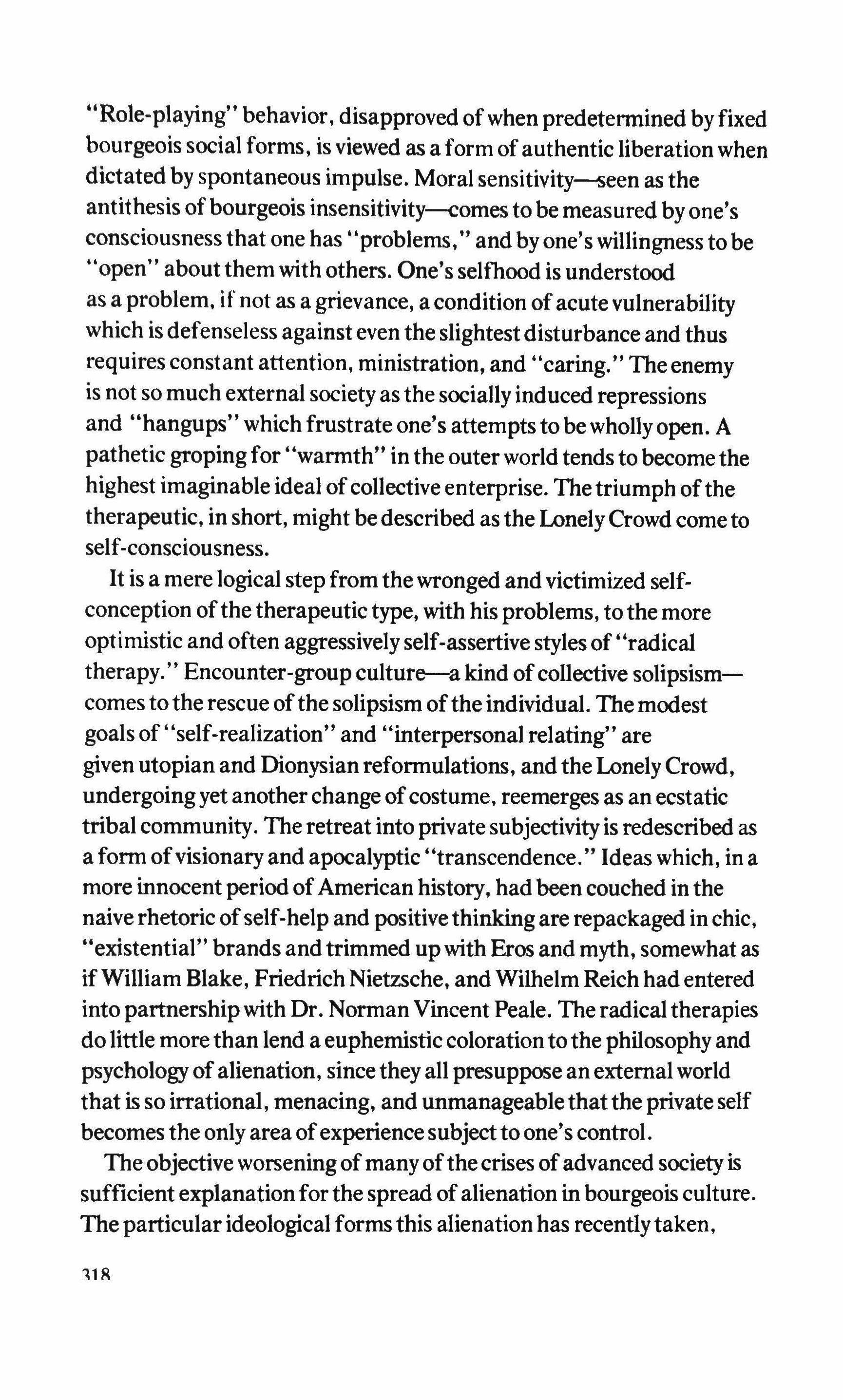
"Role-playing" behavior, disapproved ofwhen predetermined by fixed bourgeois social forms, is viewed as a form ofauthentic liberation when dictated by spontaneous impulse. Moral sensitivity-seen as the antithesis ofbourgeois insensitivity-comesto be meas ured by one's consciousness that one has "problems," and byone's willingness to be "open" about them with others. One's selfhood is understood as a problem, if not as a grievance, a condition of acute vulnerability which is defenseless against even the slightestdisturbance and thus requires constant attention, ministration, and"caring." The enemy is not so much external society as the socially induced repressions and "hangups" which frustrate one's attempts to bewhollyopen. A pathetic groping for "warmth" in the outer world tends to become the highest imaginable ideal ofcollective enterprise. The triumph ofthe therapeutic, in short, might bedescribed as the Lonely Crowd come to self-consciousness.
It is a mere logical step from the wronged and victimized selfconception ofthe therapeutic type, with his problems, to the more optimistic and often aggressivelyself-assertive styles of "radical therapy." Encounter-group culture-a kind ofcollective solipsismcomes to the rescue ofthe solipsism ofthe individual. The modest goals of "self-realization" and "interpersonalrelating" are givenutopian and Dionysianreformulations, and the LonelyCrowd, undergoingyet another change ofcostume, reemerges as an ecstatic tribal community. The retreat into privateSUbjectivityis redescribed as a form ofvisionary and apocalyptic "transcendence." Ideas which, in a more innocent period ofAmerican history, had been couched in the naive rhetoric ofself-help and positivethinking are repackaged in chic, "existential" brands and trimmed up with Eros and myth, somewhat as if William Blake, Friedrich Nietzsche, and Wilhelm Reich had entered into partnershipwith Dr. Norman Vincent Peale. The radical therapies do little more than lend a euphemistic coloration to the philosophy and psychology of alienation, sincethey all presuppose an external world that is so irrational, menacing, and unmanageablethatthe private self becomes the only area ofexperiencesubject to one's control. Theobjectiveworseningofmany ofthecrises ofadvanced societyis sufficient explanation for the spread ofalienation in bourgeois culture. The particularideological forms this alienation has recentlytaken,
11R
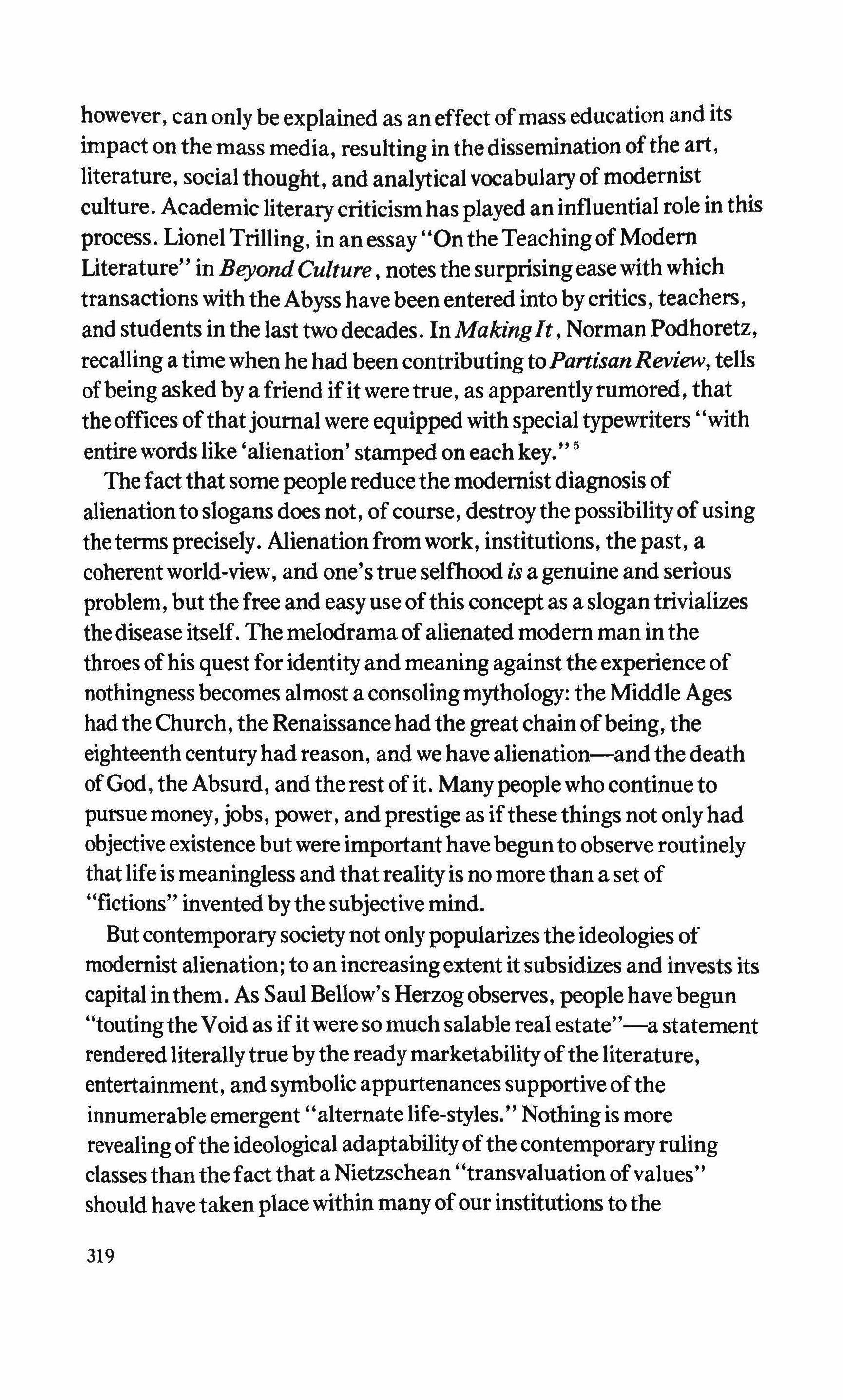
however, can onlybe explained as an effect of mass education and its impact on the mass media, resultingin thedissemination ofthe art, literature, social thought, and analyticalvocabularyofmodernist culture. Academic literarycriticism has played an influential role in this process. Lionel Trilling, in an essay''On the TeachingofModem Literature" in BeyondCulture, notes the surprising ease with which transactions with the Abyss have been entered into bycritics, teachers, and students inthe last two decades. In MakingIt, Norman Podhoretz, recalling a timewhen he had been contributing toPartisanReview, tells ofbeing asked by a friend ifit were true, as apparentlyrumored, that the offices ofthatjournal were equipped with specialtypewriters''with entirewords like 'alienation' stamped on each key." 5
Thefactthat some people reducethe modernistdiagnosis of alienation to slogans does not, of course, destroythe possibilityofusing the terms precisely. Alienationfromwork, institutions, the past, a coherent world-view, and one's true selfhood is a genuine and serious problem, butthefree and easy use ofthis concept as a slogan trivializes thedisease itself. The melodramaofalienated modem man inthe throes ofhis quest for identity and meaningagainst the experience of nothingness becomes almost a consolingmythology: the Middle Ages had the Church, the Renaissance had the great chain ofbeing, the eighteenthcenturyhad reason, and we have alienation-and the death ofGod the Absurd, and the rest ofit. Manypeoplewho continue to pursue money, jobs, power, and prestige as ifthesethings not onlyhad objectiveexistence but were important havebegun to observe routinely thatlifeis meaningless and thatrealityis no more than a set of "fictions" invented bythe SUbjective mind.
Butcontemporary society not onlypopularizes the ideologies of modernist alienation; to an increasingextent it subsidizes and invests its capital inthem. As Saul Bellow's Herzogobserves, peoplehavebegun "toutingthe Void as ifit were so much salable real estate"-a statement rendered literally true bythe readymarketabilityoftheliterature, entertainment, and symbolic appurtenances supportive ofthe innumerable emergent"alternate life-styles." Nothing is more revealing ofthe ideological adaptability ofthe contemporaryruling classes thanthefact that a Nietzschean "transvaluation ofvalues" should havetaken placewithin many of our institutions to the 319
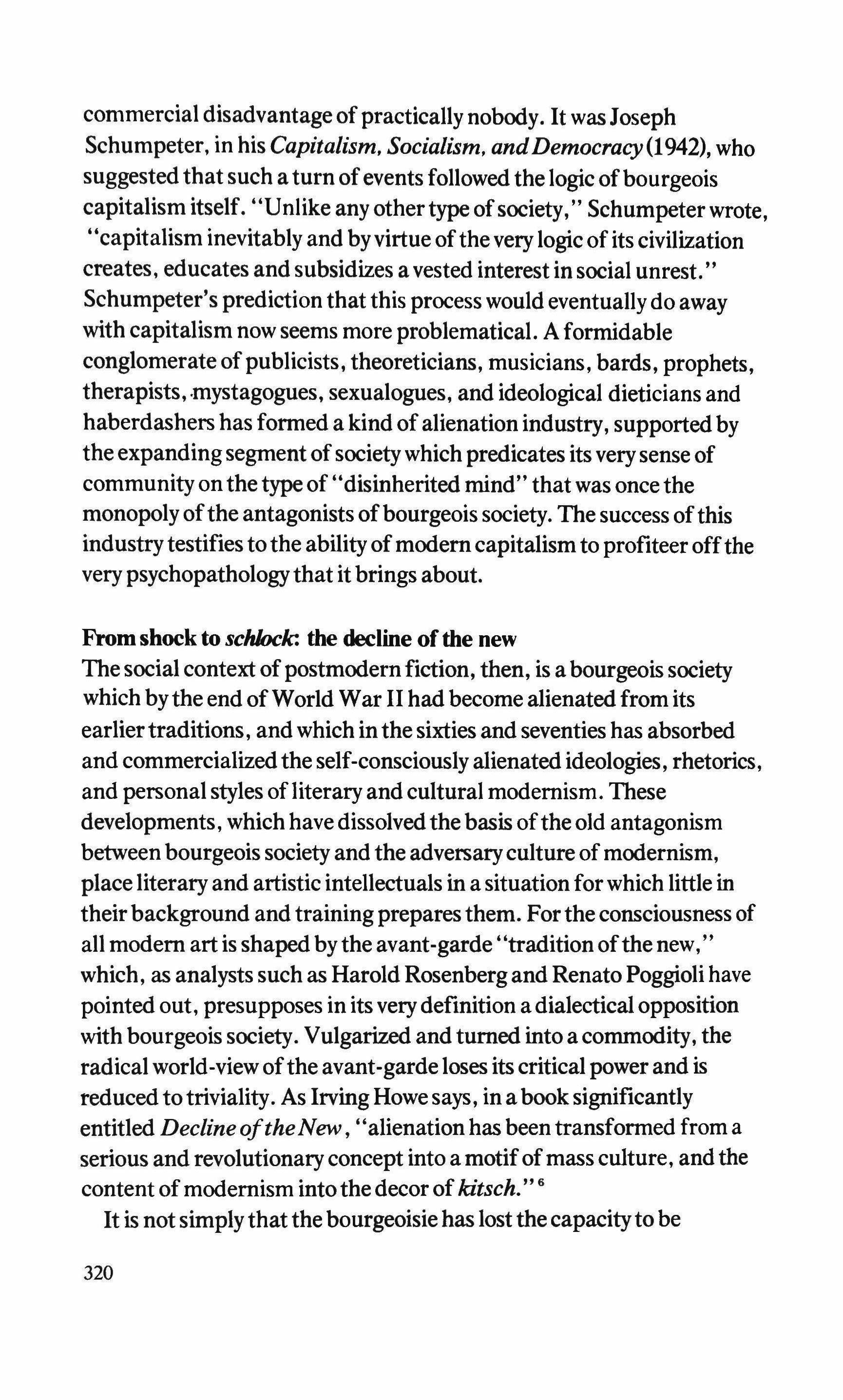
commercial disadvantage ofpracticallynobody. It was Joseph Schumpeter, in his Capitalism, Socialism, andDemocracy(1942), who suggested that such a turn ofevents followed the logic ofbourgeois capitalism itself. "Unlike any othertype ofsociety," Schumpeterwrote, "capitalisminevitably and byvirtue ofthe very logic ofits civilization creates, educates and subsidizes a vested interest in social unrest." Schumpeter's prediction that this process would eventually do away with capitalism now seems more problematical. A formidable conglomerate ofpublicists, theoreticians, musicians, bards, prophets, therapists,mystagogues, sexualogues, and ideological dieticians and haberdashers has formed a kind ofalienation industry, supportedby the expandingsegment of societywhich predicates its very sense of community on the type of "disinherited mind" that was once the monopolyofthe antagonists ofbourgeoissociety. The success ofthis industrytestifies to the ability ofmoderncapitalism to profiteer offthe very psychopathologythat itbrings about.
From shock to schlock: the decline ofthe new
The social context ofpostmodernfiction, then, is a bourgeoissociety which bythe end ofWorld War II had become alienated from its earliertraditions, and which inthe sixties and seventies has absorbed and commercialized the self-consciously alienated ideologies, rhetorics, and personalstyles ofliterary and cultural modernism. These developments, which have dissolvedthe basis ofthe old antagonism between bourgeoissociety and the adversaryculture ofmodernism, placeliterary and artistic intellectuals in a situation for which little in theirbackground and training prepares them. Forthe consciousness of all modem art is shapedbythe avant-garde "tradition ofthe new," which, as analysts such as Harold Rosenbergand Renato Poggioli have pointed out, presupposes in its very definition a dialectical opposition with bourgeois society. Vulgarized and turned into a commodity, the radical world-viewofthe avant-garde loses its critical power and is reduced totriviality. As Irving Howe says, in a book significantly entitled DeclineoftheNew, "alienation has been transformed from a serious and revolutionaryconcept into a motifof mass culture, and the content of modernism intothe decor ofkitsch." 6 It is not simplythat the bourgeoisie has lost the capacityto be
320
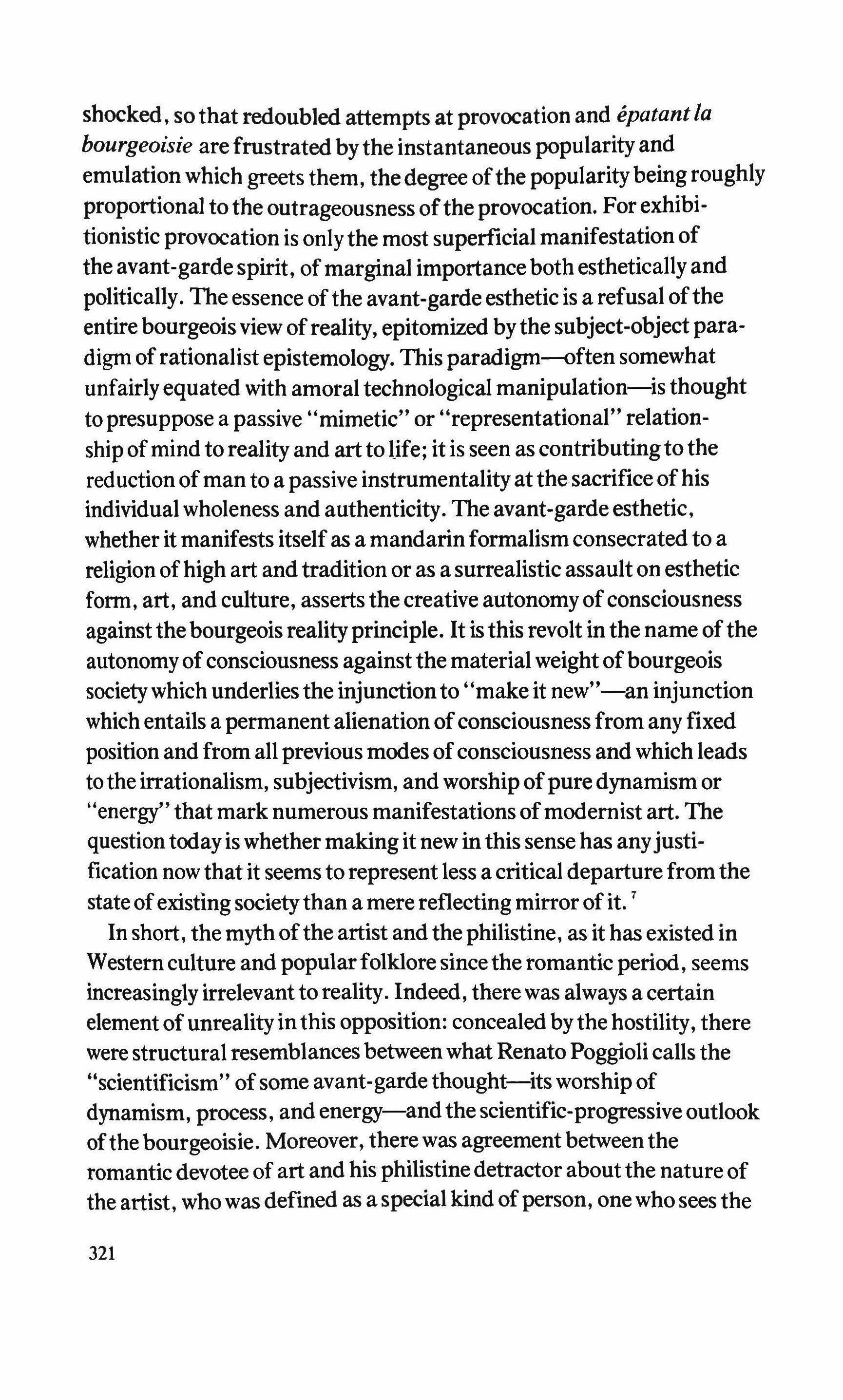
shocked, so that redoubled attempts at provocation and epatantla bourgeoisie are frustrated bythe instantaneous popularity and emulation which greets them, thedegree ofthe popularitybeingroughly proportional to the outrageousness ofthe provocation. For exhibitionistic provocation is onlythe most superficial manifestationof the avant-gardespirit, ofmarginal importanceboth esthetically and politically. The essence ofthe avant-garde esthetic is a refusal ofthe entire bourgeois view ofreality, epitomized bythe subject-object paradigm ofrationalist epistemology. This paradigm-often somewhat unfairlyequated with amoral technologicalmanipulation-isthought to presuppose a passive "mimetic" or "representational" relationship ofmind to reality and art to life; it is seen as contributingto the reduction of man to a passive instrumentality at the sacrifice ofhis individual wholeness and authenticity. The avant-gardeesthetic, whether it manifests itself as a mandarin formalism consecrated to a religion ofhigh art andtradition or as a surrealistic assault on esthetic form, art, and culture, asserts the creative autonomy ofconsciousness againstthebourgeoisrealityprinciple. It is this revolt in the name ofthe autonomyofconsciousness against the material weight ofbourgeois societywhich underlies the injunctionto "make it new" -an injunction which entails a permanent alienation ofconsciousness from any fixed position and from all previous modes ofconsciousness and which leads tothe irrationalism, SUbjectivism, and worship ofpure dynamism or "energy" that mark numerous manifestations ofmodernist art. The questiontodayiswhether makingit new in this sense has anyjustification now that it seems to represent less a critical departure from the state ofexistingsocietythan a mere reflecting mirror of it. 7
In short, the myth ofthe artist and thephilistine, as it has existed in Western culture and popularfolklore sincethe romantic period, seems increasingly irrelevant to reality. Indeed, there was always a certain element ofunreality inthis opposition: concealed bythe hostility, there were structural resemblances betweenwhat Renato Poggioli calls the "scientificism" of some avant-gardethought-itsworship of dynamism, process, and energy-and the scientific-progressive outlook ofthebourgeoisie. Moreover, there was agreement between the romantic devotee of art and his philistinedetractor about the nature of the artist, who was defined as a special kind ofperson, one who sees the
321
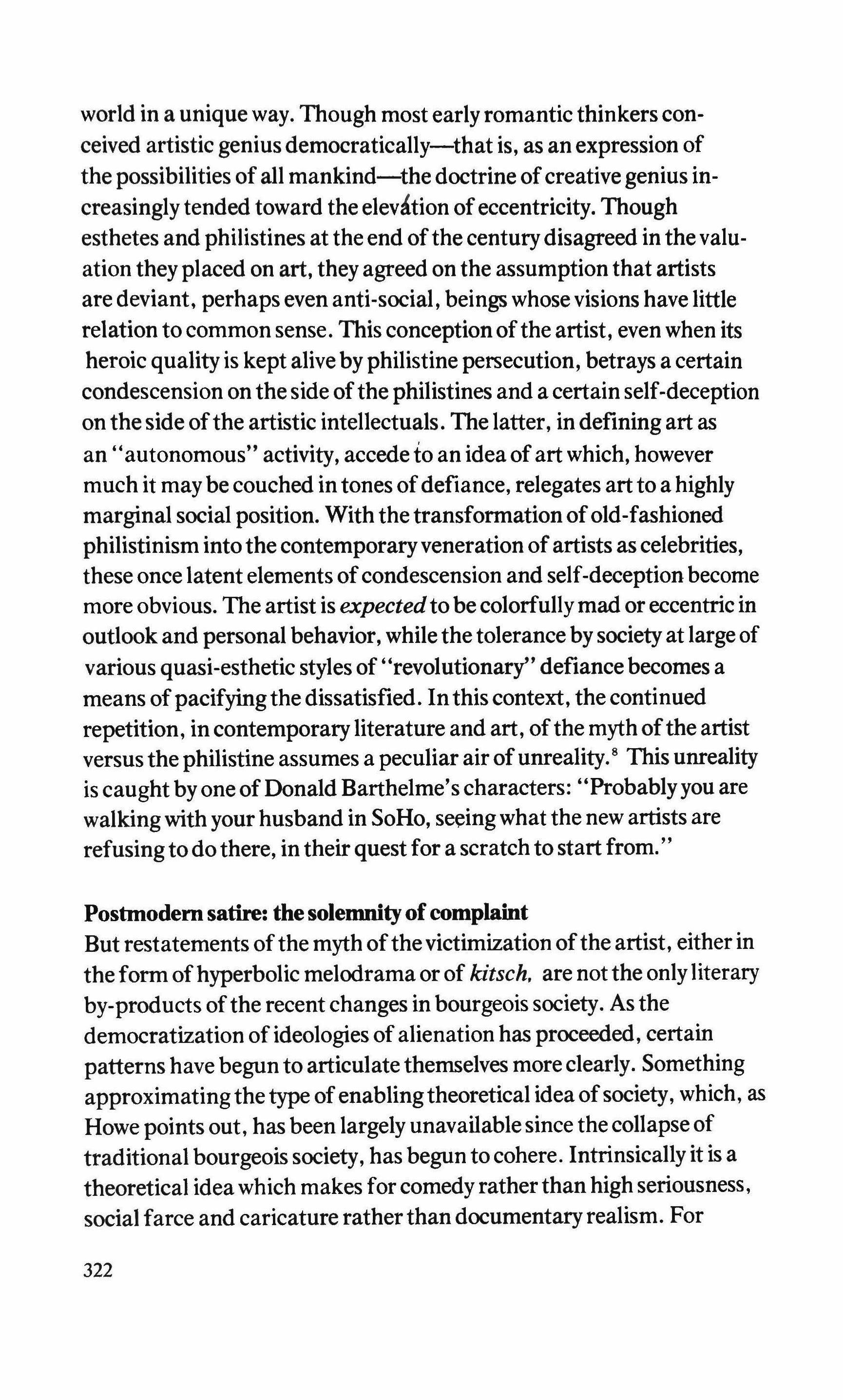
world in a unique way. Though most early romantic thinkers conceived artistic geniusdemocratically-that is, as an expression of the possibilities ofall mankind-the doctrine ofcreative genius increasinglytended toward theelevation ofeccentricity. Though esthetes and philistines at the end ofthe centurydisagreed in thevaluation theyplaced on art, theyagreed on the assumption that artists are deviant, perhaps even anti-social, beings whose visions have little relation to common sense. This conceptionofthe artist, even when its heroic quality is kept alive byphilistinepersecution, betrays a certain condescension on the side ofthe philistines and a certain self-deception on the side ofthe artistic intellectuals. The latter, in defining art as an"autonomous" activity, accede to an idea ofart which, however much it may be couched in tones ofdefiance, relegates art to a highly marginal social position. With the transformation ofold - fashioned philistinism intothe contemporaryveneration ofartists as celebrities, these once latent elements ofcondescension and self-deception become more obvious. The artist is expectedto be colorfullymad or eccentric in outlook and personal behavior, whilethe tolerance bysociety at large of various quasi-esthetic styles of "revolutionary" defiance becomes a means ofpacifyingthedissatisfied. Inthiscontext, thecontinued repetition, in contemporary literature and art, ofthe myth ofthe artist versus the philistine assumes a peculiar air ofunreality. 8 This unreality is caughtby one ofDonald Barthelme's characters: "Probablyyou are walkingwith your husband in SoRo, seeingwhat the new artists are refusing to do there, in their quest for a scratch to start from."
Postmodem satire: thesolemnity of complaint
But restatements ofthe myth ofthevictimization ofthe artist, eitherin the form ofhyperbolic melodrama or of kitsch. are not the onlyliterary by-products ofthe recent changes in bourgeoissociety. As the democratization of ideologies of alienation has proceeded, certain patterns have begun to articulate themselves more clearly. Something approximating the type ofenablingtheoretical idea ofsociety, which, as Howe points out, has been largely unavailable since the collapse of traditional bourgeoissociety, has begun to cohere. Intrinsically it is a theoretical ideawhich makes for comedyratherthan high seriousness, social farce and caricature ratherthan documentaryrealism. For
322
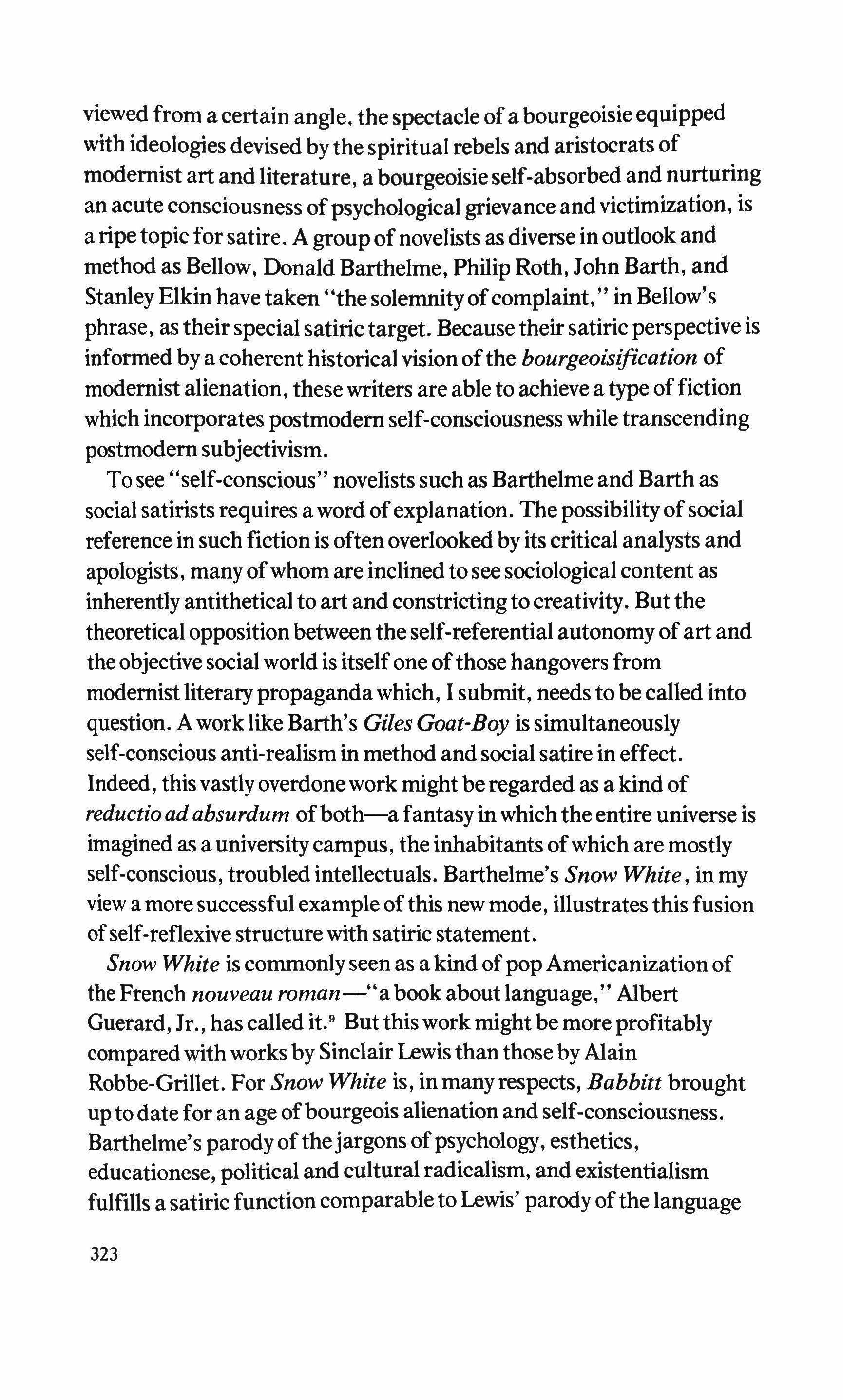
viewed from a certain angle. the spectacle of a bourgeoisieequipped with ideologies devised by the spiritual rebels and aristocrats of modernist art and literature, a bourgeoisie self-absorbed and nurturing an acute consciousness ofpsychologicalgrievance andvictimization, is a ripetopic for satire. A group ofnovelists as diverse inoutlook and method as Bellow, Donald Barthelme, Philip Roth, John Barth, and Stanley Elkin have taken''the solemnityofcomplaint," in Bellow's phrase, as their special satirictarget. Because their satiric perspective is informed by a coherent historical visionofthe bourgeoisification of modernist alienation, these writers are able to achieve a type offiction which incorporates postmodern self-consciousness while transcending postmodernSUbjectivism.
To see "self-conscious" novelists such as Barthelme and Barth as social satirists requires a word ofexplanation. The possibility ofsocial reference in such fiction is often overlooked by its critical analysts and apologists, many ofwhom are inclined to see sociological content as inherently antithetical to art and constrictingto creativity. But the theoretical oppositionbetween theself-referential autonomy of art and theobjective social world is itself one ofthose hangovers from modernist literarypropagandawhich, I submit, needs to be called into question. A work like Barth's Giles Goat-Boy is simultaneously self-conscious anti-realism in method and social satire in effect. Indeed, this vastly overdonework might be regarded as a kind of reductio adabsurdum ofboth-a fantasy inwhich theentire universe is imagined as a university campus, the inhabitants ofwhich are mostly self-conscious, troubled intellectuals. Barthelme's Snow White, in my view a more successful example ofthis new mode, illustrates this fusion ofself-reflexive structure with satiric statement.
Snow White is commonly seen as a kind of pop Americanization of the French nouveau roman-"abook about language," Albert Guerard, Jr., has called it." Butthis work might be more profitably comparedwith works by Sinclair Lewis than thoseby Alain Robbe-Grillet. For Snow White is, in many respects, Babbitt brought upto date for an age ofbourgeois alienation and self-consciousness. Barthelme's parodyofthejargons ofpsychology, esthetics, educationese, political and cultural radicalism, and existentialism fulfills a satiric function comparable to Lewis' parody ofthe language
323

ofrealtors, patriots, and civic boosters. Lewis' satire on moralistic versifying-the poetaster "Chum" Frink-is matched by Barthelme's parodicweaving of quotationsthroughout his novel from such somber modernist writers as Kierkegaard, Eliot, Malcolm Lowry, and others, whose anguishtoday seems almost as pervasive as the optimistic pieties of Edgar Guest had been in the twenties. Snow White's seven hapless suitors are self-estranged Babbitts: "Whereas once we were simple bourgeois who knew what to do," they reflect together at one point, "now we are complexbourgeois who are at a loss. We do not like this complexity. We circle it wearily, prodding it from time to time with a shopkeeper'sforefinger: What is it? Is it, perhaps, badforbusiness?" What has altered everything for the seven is their having encountered the personified Spirit ofAlienation herself, Snow White, the woman who can find no heroes in her life (only"prince-figures"), who is bored byeverything, most of all her own boredom("Oh I wish there were some words in the world that were not the words I always hear!"), and who is unable to discover any "meaningful role." A chapterlisting Snow White's college courses provides some clue to the origin ofher condition:
Beaver College is where she got her education. She studied Modem Woman. Her PrivilegesandResponsibilies: the nature and nurture of women and what they stand for, in evolution and in history. includinghouseholding,upbringing, peace-keeping,bealing and devotion, and how these contribute to the rehumanizing of today's world. Then she studied Classical GuitarI. utilizing the methods and techniques ofSor,Tarrega,Sego\'ia, etc. Then she studied English Romantic Poets II: Shelley, Byron, Keats. Then sbe studied Theoretical Foundations ofPsychology: mind, consciousness, unconscious mind, personality, tbe self, interpersonal relations, psychosexual norms, social games, groups, adjustment, conflict, authority, individuation, integration and mental health Then she studied Personal Resources Iand II: self-evaluation, developing the courage to respond tothe environment, opening and using the mind, indi\'idual experience, training, the use of time, mature redefinition of goals, action projects
The irony ofthisjargon, the lingua franca of modish alienation, is that the more elaborate and complicated it becomes, the more it contributes to the disabling self-consciousness and self-estrangement it is supposed to explain and help us overcome. The self-parodic form of Snow White as a whole, in which ostentatiously "literary" language is used to tell the story as a means of ridiculingthe pretensions ofliterary communication, is finally a form ofcultural statement: it emphasizes thedissociation which has set in between genuine feelings ofalienation and
324
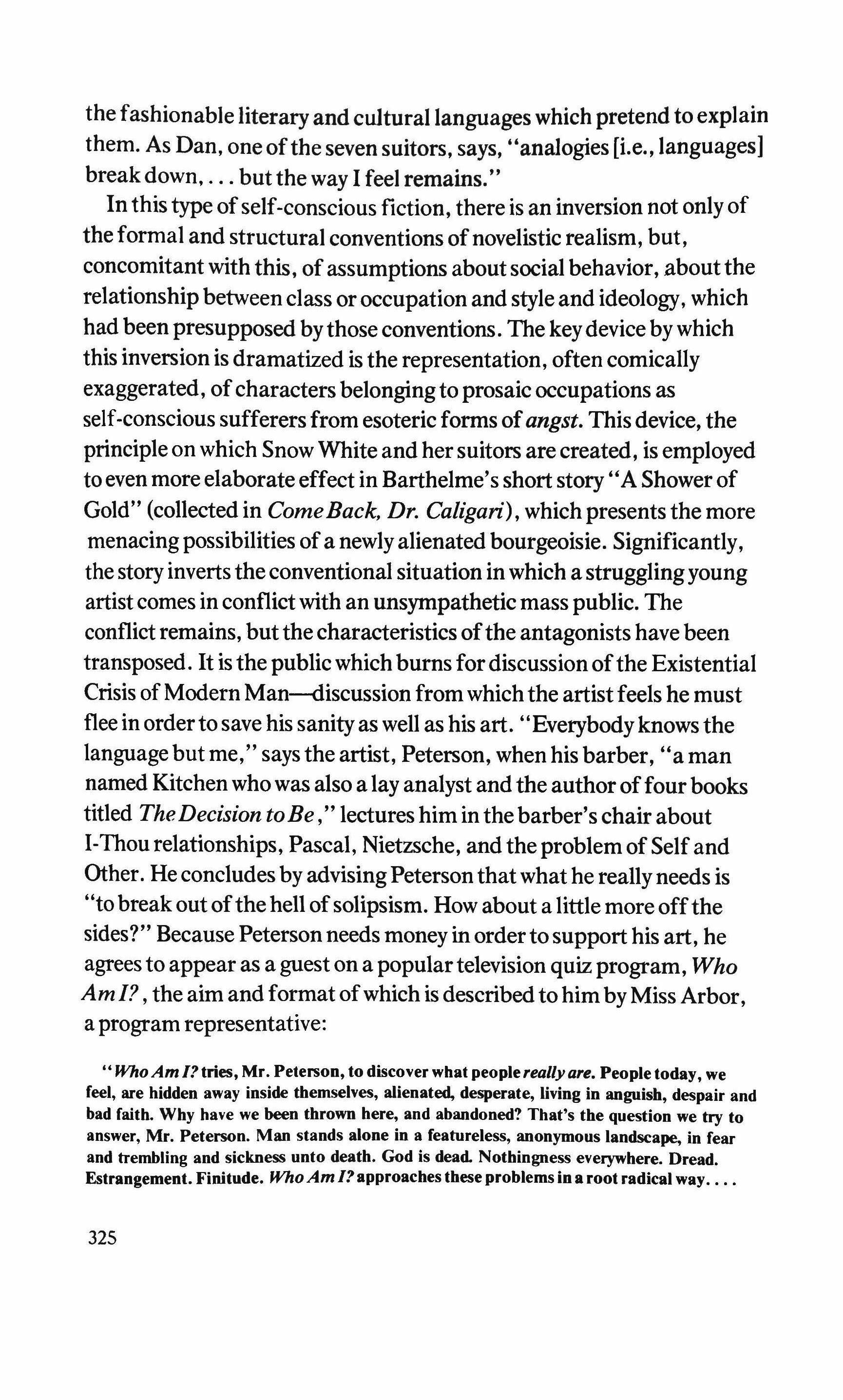
the fashionable literary and cultural languages which pretend to explain them. As Dan, one ofthe seven suitors, says, "analogies [i.e., languages] break down, but the way I feel remains."
In this type ofself-conscious fiction, there is an inversion not only of the formal and structural conventions ofnovelistic realism, but, concomitant with this, of assumptions about social behavior, aboutthe relationship between class or occupation and style and ideology, which had been presupposed by those conventions. The keydevice by which this inversion is dramatized is the representation, often comically exaggerated, ofcharactersbelonging to prosaicoccupations as self-conscious sufferers from esoteric forms ofangst. This device, the principle on which Snow White and her suitors are created, is employed to even more elaborate effect in Barthelme's short story"A Shower of Gold" (collected in ComeBack, Dr. Caligari), which presents the more menacingpossibilities of a newly alienated bourgeoisie. Significantly, the story inverts the conventional situation in which a struggling young artist comes in conflict with an unsympathetic mass public. The conflict remains, butthe characteristics ofthe antagonists have been transposed. It is the publicwhich burns fordiscussionofthe Existential Crisis of Modern Man-discussion from which the artist feels he must flee in orderto save his sanity as well as his art. "Everybodyknows the language but me," says the artist, Peterson, when his barber, "a man named Kitchen who was also a layanalyst and the authoroffour books titled TheDecision toBe ," lectures him in thebarber's chair about J-Thou relationships, Pascal, Nietzsche, and the problem of Self and Other. He concludes byadvisingPeterson that what he reallyneeds is "tobreak out ofthehell ofsolipsism. How about a little more offthe sides?" Because Peterson needs money in order to support his art, he agrees to appear as a guest on a populartelevision quiz program, Who AmI? , the aim and format ofwhich is described to him by Miss Arbor, a program representative:
Who Am f?tries, Mr. Peterson, to discover what people really are. People today, we feel, are hidden away inside themselves, alienated, desperate, living in anguish, despair and bad faith. Why have we been thrown here, and abandoned? That's the question we try to answer, Mr. Peterson. Man stands alone in a featureless, anonymous landscape. in fear and trembling and sickness unto death. God is dead. Nothinguess everywhere. Dread. Estrangement. Finitude. Who Am f? approaches these problems in a root radical way
325
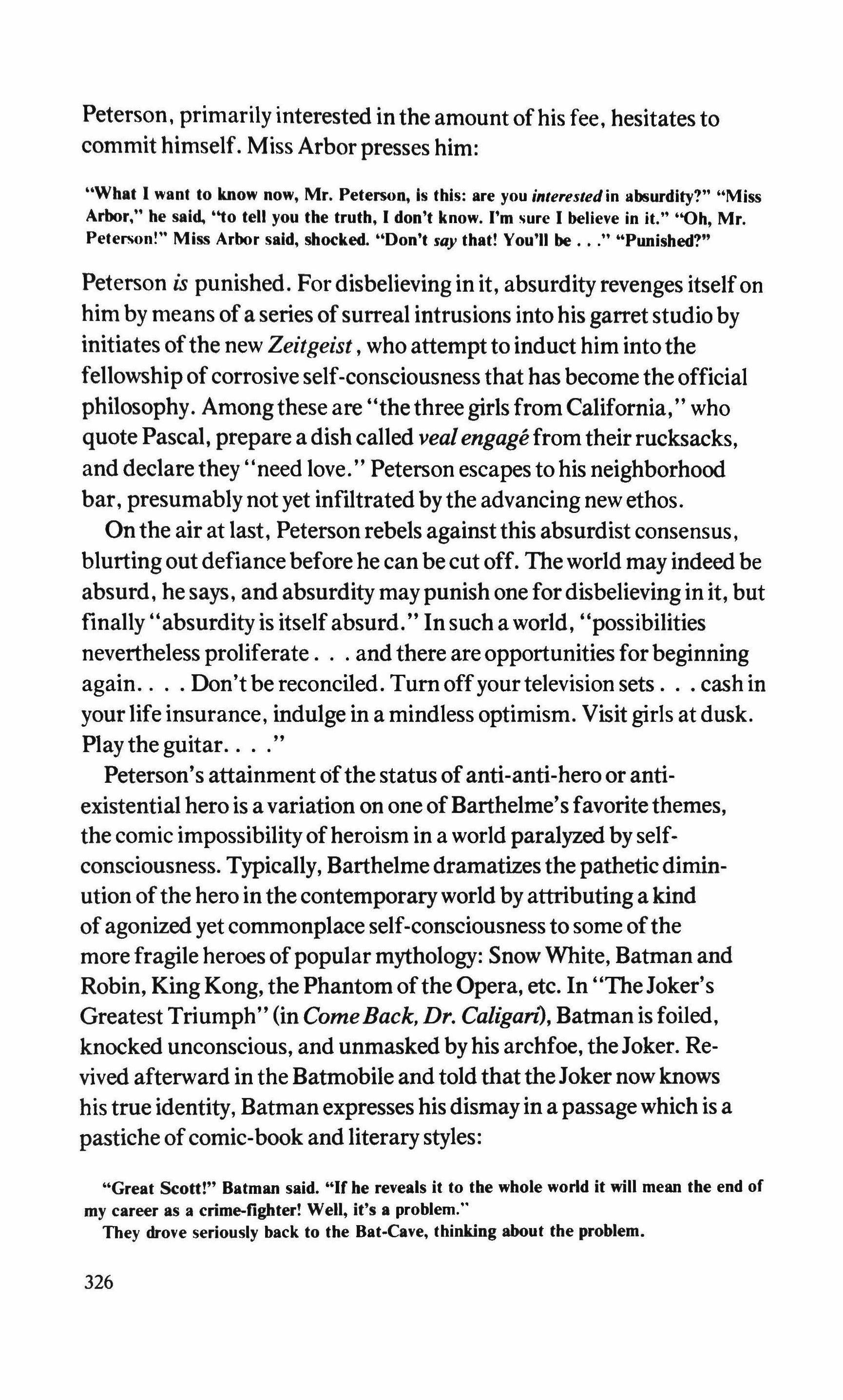
Peterson, primarily interested inthe amount ofhis fee, hesitates to commit himself. Miss Arbor presses him:
"What I want to know now, Mr. Peterson, Is this: are you interested in absurdity?" "Miss Arbor," he said, "to tell you the truth, I don't know. I'm sure I believe in it." "Oh, Mr. Peterson!" Miss Arbor said, shocked. "Don't say that! You'll be "Punished?"
Peterson is punished. For disbelieving in it, absurdity revenges itself on him by means of a series ofsurreal intrusions into his garret studio by initiates ofthe new Zeitgeist, who attempt to induct him intothe fellowship ofcorrosive self-consciousness that has become the official philosophy. Amongthese are "the three girls from California," who quote Pascal, prepare a dish called vealengagefrom their rucksacks, and declare they "need love." Peterson escapes to his neighborhood bar, presumably not yet infiltrated bythe advancing new ethos.
Onthe air at last, Peterson rebels againstthis absurdist consensus, blurting out defiance before he can be cut off. The world may indeed be absurd, he says, and absurdity may punish one fordisbelieving in it, but finally"absurdity is itselfabsurd." In such a world, "possibilities nevertheless proliferate. and there are opportunities forbeginning again Don't be reconciled. Turn offyourtelevision sets cash in your life insurance, indulge in a mindless optimism. Visit girls at dusk. Play the guitar. ."
Peterson's attainment ofthe status ofanti-anti-hero or antiexistential hero is a variation on one ofBarthelme's favoritethemes, the comic impossibility ofheroism in a world paralyzedby selfconsciousness. Typically, Barthelme dramatizes the patheticdiminution ofthe hero in the contemporary world byattributing a kind ofagonized yetcommonplace self-consciousness to some ofthe more fragile heroes of popularmythology: Snow White, Batman and Robin, KingKong, the Phantom ofthe Opera, etc. In "The Joker's Greatest Triumph" (in ComeBack, Dr. Caligan), Batman is foiled, knocked unconscious, and unmasked byhis archfoe, theJoker. Revived afterward in the Batmobile and told thattheJoker now knows his true identity, Batman expresses his dismay in a passagewhich is a pastiche ofcomic-book and literarystyles:
"Great Scott!" Batman said. "If he reveals it to the whole world it will mean the end of my career as a crime-fighter! Well, it's a problem." They drove seriously back to the Bat-Cave, thinking about the problem.
326
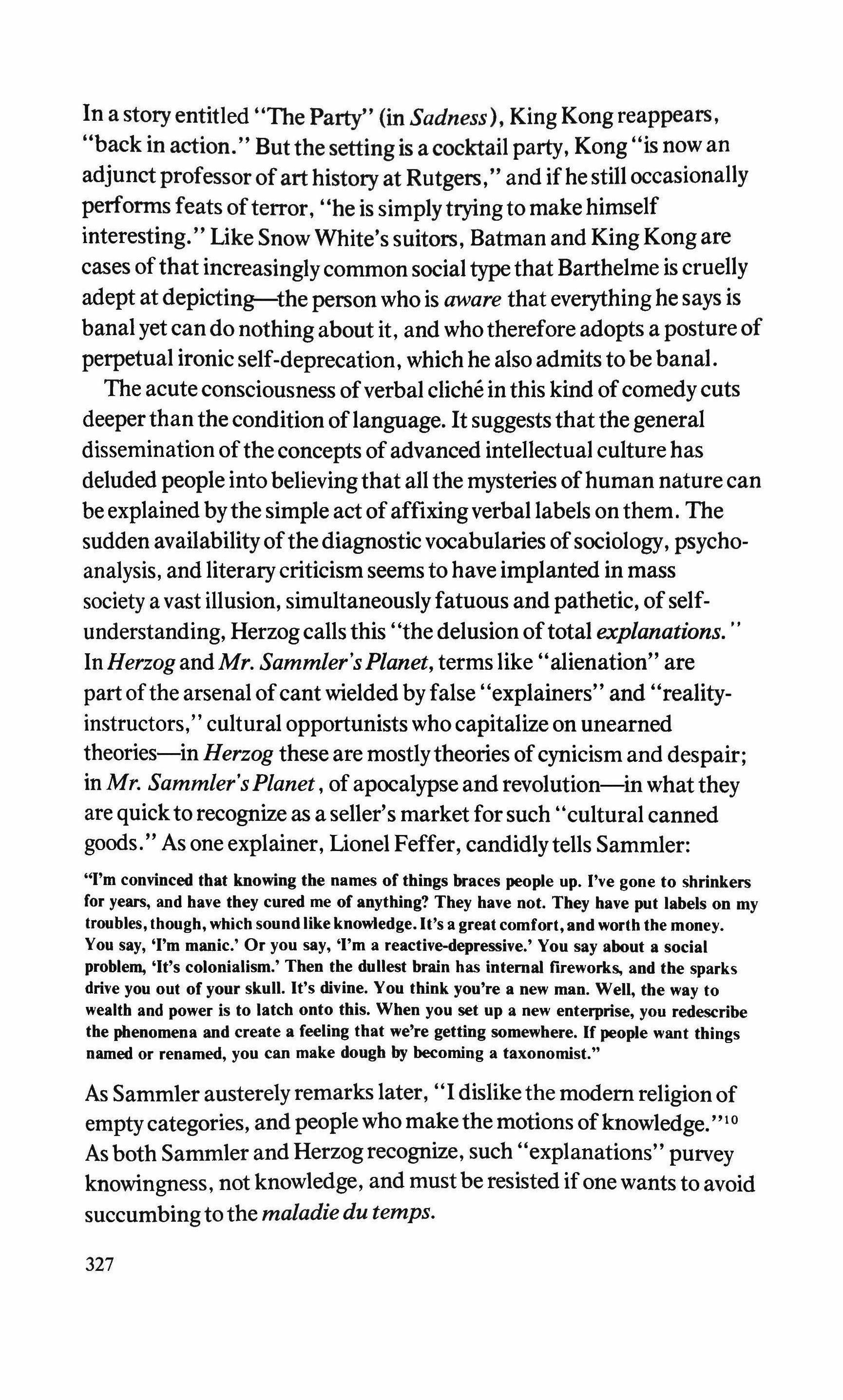
In a story entitled "The Party" (in Sadness), King Kong reappears, "back in action." Butthe setting is a cocktail party, Kong "is now an adjunctprofessor ofart history at Rutgers," and ifhe still occasionally performs feats ofterror, "he is simplytrying to make himself interesting." Like Snow White's suitors, Batman and KingKong are cases ofthat increasingly common social typethat Barthelme is cruelly adept at depicting-the person who is aware that everything he says is banal yet can do nothing about it, and whotherefore adopts a posture of perpetual ironic self-deprecation, which he also admits to be banal.
The acute consciousness ofverbal cliche inthis kind ofcomedy cuts deeperthan the condition oflanguage. It suggests thatthegeneral dissemination ofthe concepts of advanced intellectual culture has deluded people into believingthat all the mysteries ofhuman nature can be explainedbythe simple act of affixingverbal labels on them. The sudden availability ofthediagnostic vocabularies ofsociology, psychoanalysis, and literary criticism seems to have implanted in mass society a vast illusion, simultaneouslyfatuous and pathetic, of selfunderstanding, Herzogcalls this''the delusion oftotal explanations."
In Herzog and Mr. Sammler'sPlanet, terms like "alienation" are part ofthe arsenal ofcant wielded by false "explainers" and "realityinstructors," cultural opportunists who capitalize on unearned theories-in Herzog these are mostlytheories ofcynicism and despair; in Mr. Sammler'sPlanet, of apocalypse and revolution-in whatthey are quickto recognize as a seller's market forsuch" cultural canned goods." As one explainer, Lionel Feffer, candidly tells Sammler: "I'm convinced that knowing the names of things braces people up. I've gone to shrinkers for years, and have they cured me of anything? They have not. They have put labels on my troubles,though, which sound like knowledge. It's a great comfort, and worth the money. You say, 'I'm manic.' Or you say, 'I'm a reactive-depressive.' You say about a social problem, 'It's colonialism.' Then the dullest brain has internal fireworks, and the sparks drive you out of your skull. It's divine. You think you're a new man. Well, the way to wealth and power is to latch onto this. When you set up a new enterprise, you redescribe the phenomena and create a feeling that we're getting somewhere. If people want things named or renamed, you can make dough by becoming a taxonomist."
As Sammler austerely remarks later, "I dislike the modern religion of emptycategories, and people who make the motions ofknowledge." 1 0 As both Sammler and Herzogrecognize, such "explanations" purvey knowingness, not knowledge, and must be resisted if one wants to avoid succumbingto the maladiedu temps.
327
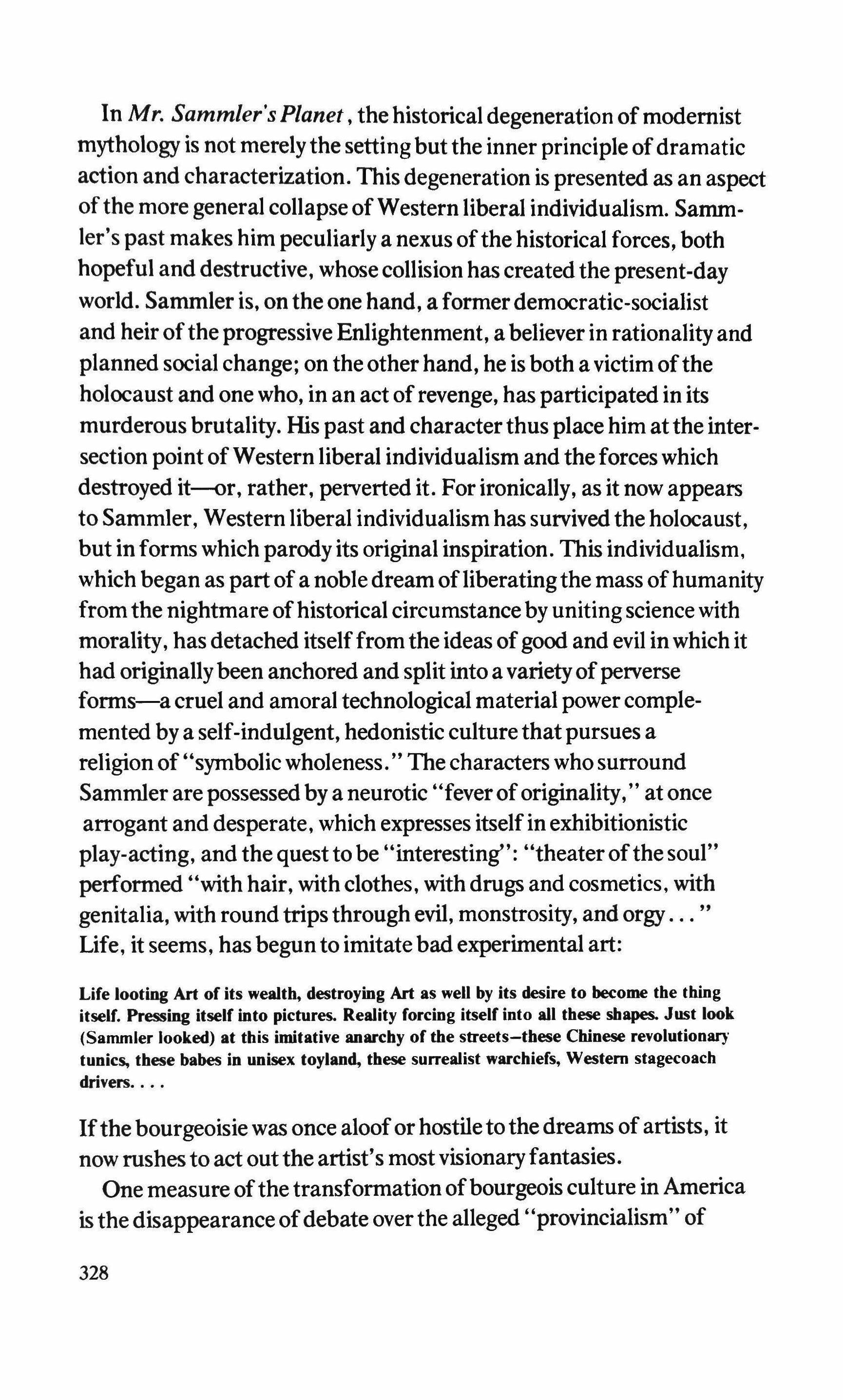
In Mr. Sammler'sPlanet, the historical degeneration ofmodernist mythology is not merelythe settingbut the inner principle ofdramatic action and characterization. This degeneration is presented as an aspect ofthe more general collapse ofWestern liberal individualism. Samrnler's past makes him peculiarly a nexus ofthe historical forces, both hopeful and destructive, whose collision has created the present-day world. Samrnler is, on the one hand, a formerdemocratic-socialist and heir ofthe progressiveEnlightenment, a believer in rationality and planned social change; on the other hand, he is both a victim ofthe holocaust and one who, in an act of revenge, has participated in its murderous brutality. His past and characterthus place him at the intersection point ofWestern liberal individualism and theforces which destroyed it-or, rather, perverted it. For ironically, as it now appears to Sammler, Western liberal individualism has survived the holocaust, but in forms which parody its originalinspiration. This individualism, which began as part of a noble dream ofliberatingthe mass ofhumanity fromthe nightmare ofhistorical circumstance byuniting science with morality, has detached itselffrom the ideas ofgood and evil inwhich it had originallybeen anchored and split into a varietyofperverse forms-a cruel and amoral technological material power complemented by a self-indulgent, hedonistic culture thatpursues a religionof"symbolic wholeness." The characters who surround Sammler are possessedby a neurotic "feveroforiginality," at once arrogant and desperate, which expresses itself in exhibitionistic play-acting, and the questto be "interesting": "theaterofthesoul" performed "with hair, with clothes, with drugs and cosmetics, with genitalia, with round tripsthroughevil, monstrosity, and orgy Life, it seems, has begun to imitate bad experimental art:
Life looting Art of its wealth, destroying Art as well by its desire to become the thing itself. Pressing itself into pictures. Reality forcing itself into all these shapes. Just look (Sammler looked) at this imitative anarchy of the streets-these Chinese revolutionary tunics, these babes in unisex toyland, these surrealist warchiefs, Western stagecoach drivers
Ifthe bourgeoisie was once aloof or hostileto the dreams ofartists, it now rushes to act out the artist's most visionaryfantasies. One measure ofthe transformation ofbourgeois culture in America is the disappearance ofdebate over the alleged "provincialism" of
328
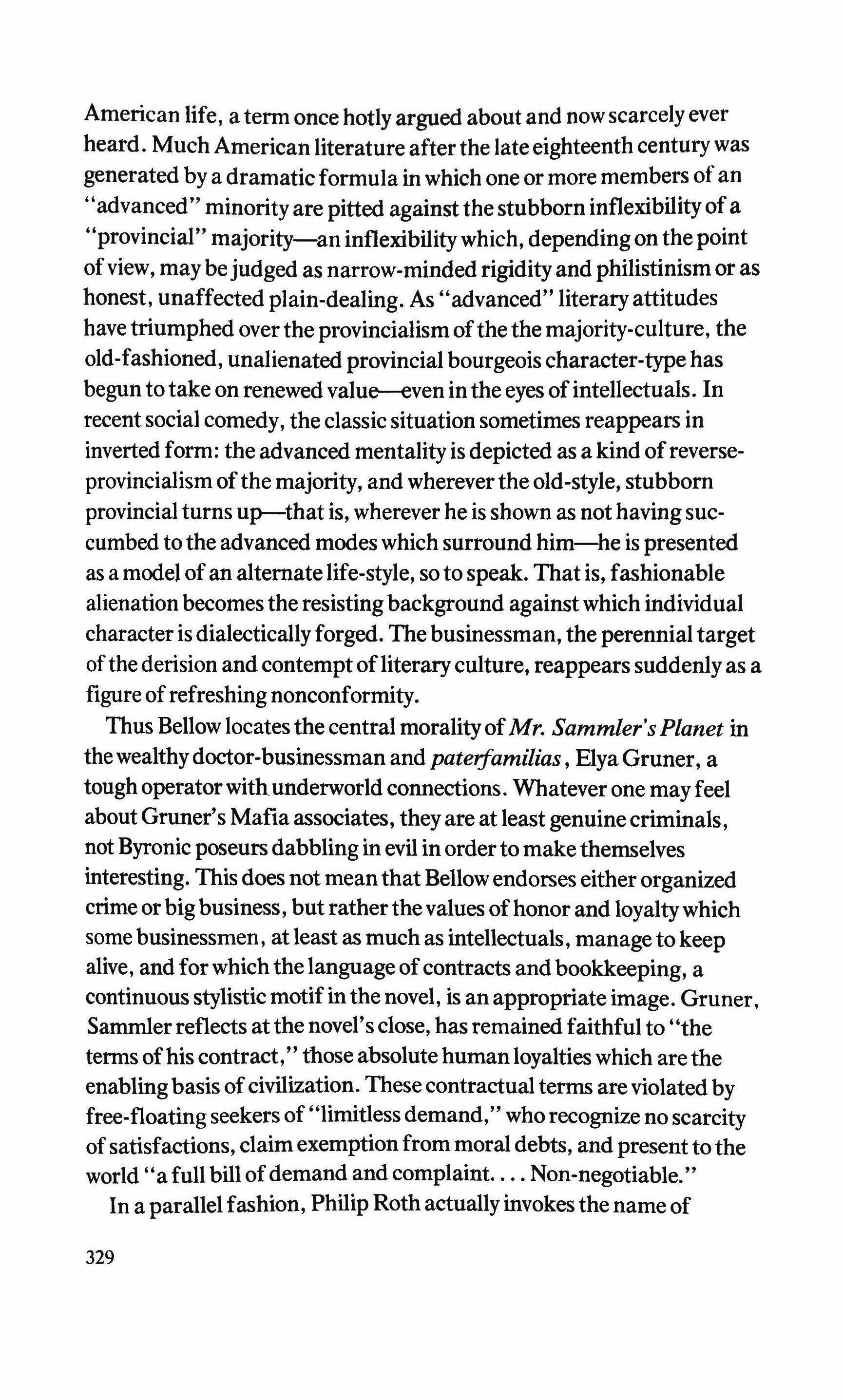
American life, a term once hotlyargued about and now scarcely ever heard. Much American literature after the late eighteenth century was generated by a dramatic formula in which one or more members of an advanced" minority are pitted against the stubborn inflexibility of a "provincial" majority-aninflexibilitywhich, depending on the point ofview, maybejudged as narrow-minded rigidityand philistinism or as honest, unaffected plain-dealing. As "advanced" literaryattitudes have triumphed over the provincialism ofthethe majority-culture, the old-fashioned, unalienated provincial bourgeoischaracter-type has begun to take on renewed value-seven in the eyes ofintellectuals. In recent social comedy, the classic situation sometimes reappears in inverted form: the advanced mentality is depicted as a kind of reverseprovincialism ofthe majority, and whereverthe old-style, stubborn provincial turns up-thatis, wherever he is shown as not having succumbed to the advanced modes which surround him-he is presented as a model of an alternate life-style, so to speak. That is, fashionable alienation becomes the resistingbackground against which individual character is dialecticallyforged. The businessman, the perennial target ofthe derision and contemptofliteraryculture, reappears suddenly as a figure ofrefreshingnonconformity.
Thus Bellow locatesthe central moralityofMr. Sammler'sPlanet in thewealthydoctor-businessman and paterfamilias, ElyaGruner, a toughoperatorwithunderworld connections. Whatever one may feel about Gruner's Mafia associates, they are at least genuinecriminals, not Byronic poseurs dabbling in evil inorderto make themselves interesting. This does not mean that Bellowendorses either organized crime or bigbusiness, but ratherthevalues ofhonor and loyaltywhich some businessmen, at least as much as intellectuals, manage to keep alive, and forwhich thelanguage ofcontracts and bookkeeping, a continuous stylistic motif in the novel, is an appropriateimage. Gruner, Sammlerreflects at the novel's close, has remained faithful to "the terms ofhis contract," those absolute humanloyalties which are the enablingbasis ofcivilization. These contractual terms are violated by free-floating seekers of "limitless demand," whorecognize no scarcity ofsatisfactions, claim exemption from moral debts, and present to the world "afull bill ofdemand and complaint Non-negotiable." In a parallel fashion, Philip Roth actually invokes the name of
329
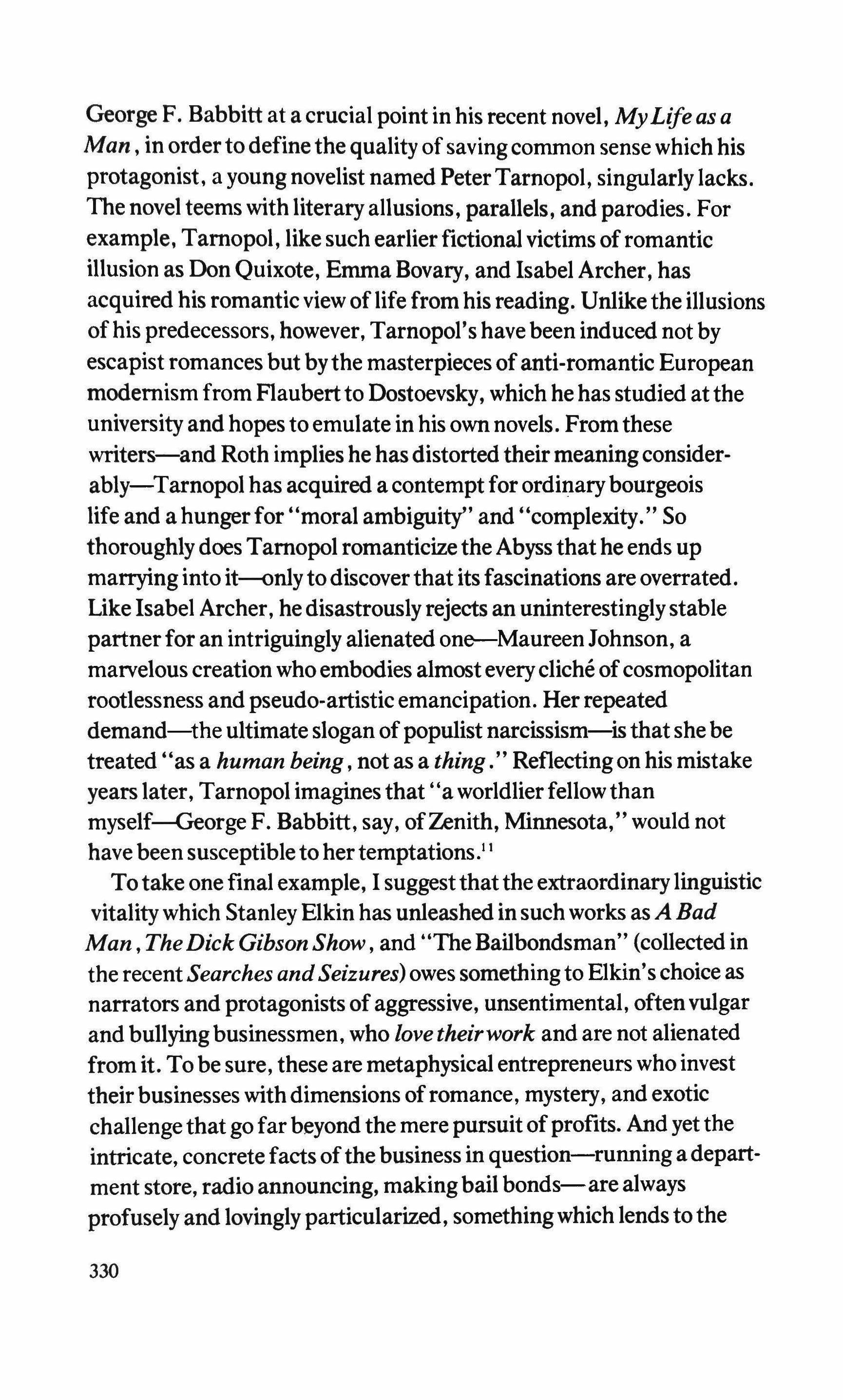
George F. Babbitt at a crucial point in his recent novel, MyLife as a Man, in order to define the quality ofsaving common sense which his protagonist, a young novelist named PeterTarnopol, singularly lacks. The novel teems with literary allusions, parallels, and parodies. For example, Tarnopol, like such earlier fictional victims ofromantic illusion as Don Quixote, Emma Bovary, and Isabel Archer, has acquired his romantic view oflife from his reading. Unlike the illusions ofhis predecessors, however, Tarnopol's have been induced not by escapist romances but bythe masterpieces ofanti-romantic European modernism from Flaubert to Dostoevsky, which he has studied at the university and hopes to emulate in his own novels. From these writers-and Roth implies he hasdistorted their meaningconsiderably-Tarnopol has acquired a contempt for ordinarybourgeois life and a hungerfor "moral ambiguity" and "complexity." So thoroughly does Tarnopol romanticize the Abyss that he ends up marryinginto it-only to discover that its fascinations are overrated. Like Isabel Archer, he disastrouslyrejects an uninterestinglystable partnerfor an intriguingly alienated one-Maureen Johnson, a marvelous creation who embodies almosteverycliche ofcosmopolitan rootlessness and pseudo-artisticemancipation. Her repeated demand-the ultimate slogan ofpopulist narcissism-is that shebe treated "as a human being, not as a thing." Reflecting on his mistake years later, Tarnopolimagines that "aworldlierfellow than myself--George F. Babbitt, say, ofZenith, Minnesota," would not have been susceptible to hertemptations."
Totake one final example, I suggestthatthe extraordinarylinguistic vitalitywhich Stanley Elkin has unleashed in such works as A Bad Man, TheDick Gibson Show, and "The Bailbondsman" (collected in the recent Searches andSeizures) owes something to Elkin's choice as narrators and protagonists ofaggressive, unsentimental, often vulgar and bullyingbusinessmen, who love theirwork and are not alienated from it. To be sure, these are metaphysical entrepreneurs who invest their businesses withdimensions of romance, mystery, and exotic challengethat go farbeyond the mere pursuit ofprofits. And yet the intricate, concrete facts ofthe business in question-running a department store, radio announcing, makingbail bonds-are always profusely and lovinglyparticularized, somethingwhich lends to the
330
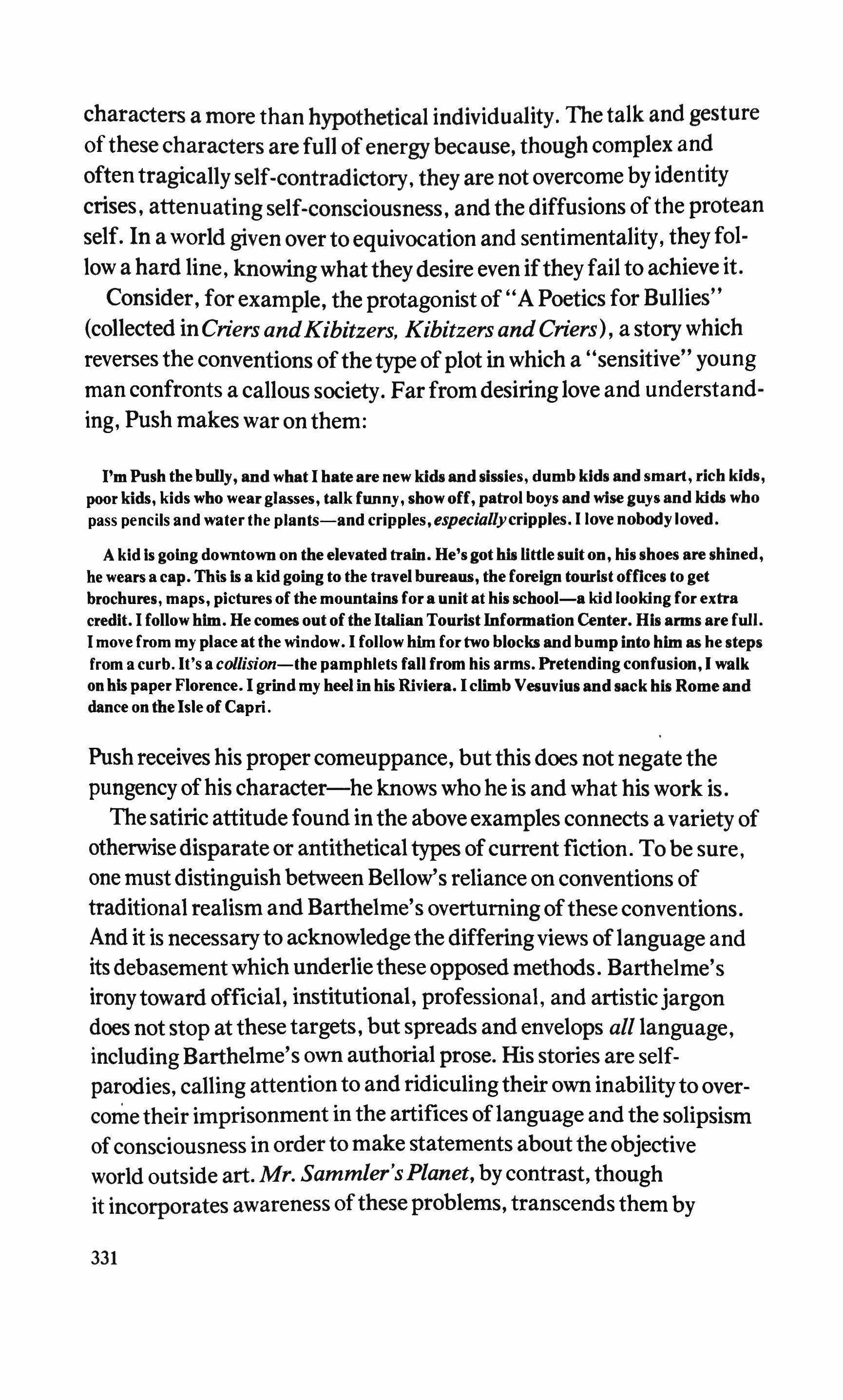
characters a more than hypothetical individuality. The talk and gesture ofthese characters are full ofenergy because, thoughcomplex and often tragicallyself-contradictory, they are not overcome byidentity crises, attenuatingself-consciousness, and the diffusions ofthe protean self. In a world given over to equivocation and sentimentality, they folIowa hard line, knowingwhattheydesire even iftheyfail to achieve it.
Consider, forexample, the protagonist of"A Poetics for Bullies" (collected inCriers andKibitzers, Kibitzers andCriers), a story which reverses the conventions ofthetype ofplot in which a "sensitive" young man confronts a callous society. Farfromdesiringlove and understanding, Push makes war on them:
I'm Push the bully, and what I hate are new kids and sissies, dumb kids and smart, rich kids, poor kids, kids who wear glasses, talk funny, showoff, patrol boys and wise guys and kids who pass pencils and water the plants-and cripples,especiallycripples. I love nobodyloved.
A kid Is going downtown on the elevated train. He's got his Uttle suit on, his shoes are shined, he wears a cap. This Is a kid going to the travel bureaus, the foreign tourist offices to get brochures, maps, pictures of the mountains for a unit at his school-a kid looking for extra credit. I follow him. He comes out ofthe Italian Tourist Information Center. His arms are full. I move from my place at the window. I follow him for two blocks and bump into him as he steps from a curb. It's a collision-the pamphlets fall from his arms. Pretendingconfusion, I walk on his paper Florence. I grind my heel in his Riviera. I climb Vesuvius and lack his Rome and dance on the Isleof Capri.
Push receives his propercomeuppance, butthis does not negate the pungencyofhis character-he knows who he is and what his work is.
Thesatiric attitude found inthe aboveexamples connects a variety of otherwisedisparate or antithetical types ofcurrent fiction. To be sure, one must distinguish between Bellow's reliance on conventions of traditional realism and Barthelme's overturningofthese conventions. And it is necessary to acknowledgethe differingviews oflanguage and its debasementwhich underliethese opposed methods. Barthelme's ironytoward official, institutional, professional, and artisticjargon does not stop at these targets, but spreads and envelops all language, includingBarthelme's own authorial prose. His stories are selfparodies, calling attention to and ridiculingtheir own inabilityto overcometheir imprisonment in the artifices oflanguage and the solipsism ofconsciousness in order to make statements about the objective world outside art. Mr. Sammler'sPlanet, bycontrast, though it incorporates awareness ofthese problems, transcends them by
331
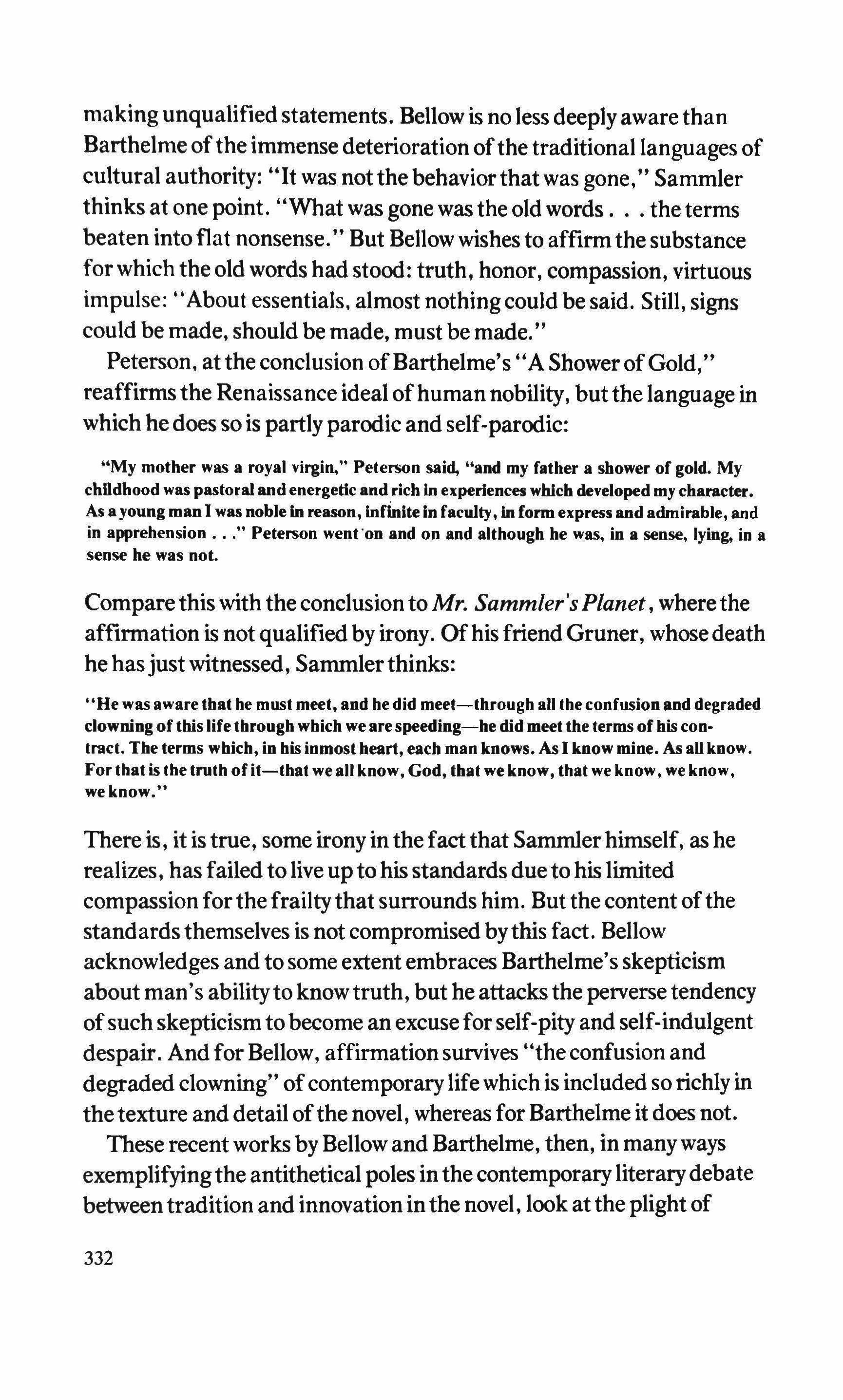
makingunqualified statements. Bellow is no less deeply aware than Barthelme ofthe immense deterioration ofthe traditional languages of cultural authority: "It was notthe behaviorthat was gone," Sammler thinks at one point. "What was gone was the old words the terms beaten intoflat nonsense." But Bellow wishes to affirmthe substance for which the old words had stood: truth, honor, compassion, virtuous impulse: "About essentials, almost nothingcould be said. Still, signs could be made, should be made, must be made."
Peterson, at the conclusion ofBarthelme's A Shower ofGold," reaffirms the Renaissance ideal ofhuman nobility, butthe language in which he does so is partlyparodic and self-parodic:
"My mother was a royal virgin." Peterson said, "and my father a shower of gold. My chUdhood was pastoral and energetic and rich In experiences which developed my character. As a young man I was noble In reason, infinite In faculty, In form express and admirable, and in apprehension Peterson wenton and on and although he was, in a sense. lying, in a sense he was not.
Comparethis with the conclusion to Mr. Sammler'sPlanet, wherethe affirmation is not qualifiedbyirony. Ofhis friend Gruner, whose death he hasjustwitnessed, Sammlerthinks:
"He was aware that he must meet, and he did meet-through all the confusion and degraded clowning of this life through which we are speeding-he did meet the terms of his contract. The terms which, in his inmost heart, each man knows. As I know mine. As aU know. For that is the truth ofit-that we all know, God, that we know, that we know, we know, we know."
There is, it is true, some irony in the factthat Sammler himself, as he realizes, has failed to live up to his standards due to his limited compassion for the frailtythat surrounds him. But the content ofthe standards themselves is not compromisedbythis fact. Bellow acknowledges and to some extent embraces Barthelme's skepticism about man's abilityto knowtruth, but he attacks the perverse tendency ofsuch skepticism tobecome an excuse forself-pity and self-indulgent despair. And for Bellow, affirmation survives "the confusion and degradedclowning" ofcontemporary lifewhich is included so richly in thetexture and detail ofthe novel, whereas for Barthelme it does not.
These recent works by Bellow and Barthelme, then, in manyways exemplifyingthe antithetical poles in the contemporaryliterarydebate betweentradition and innovation inthe novel, look at the plight of
332
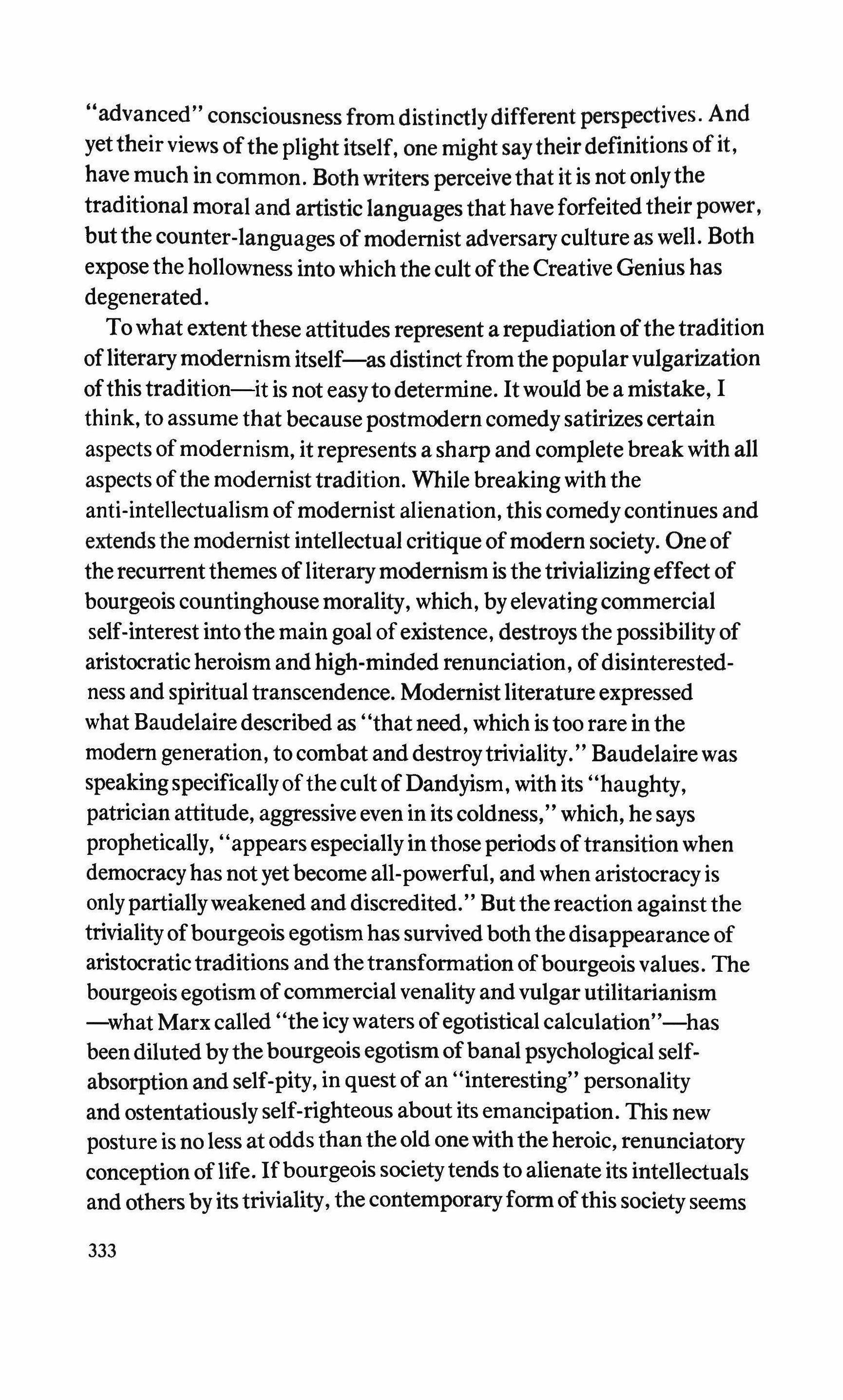
"advanced" consciousness from distinctlydifferent perspectives. And yettheirviews ofthe plight itself. one might saytheirdefinitions ofit. have much in common. Both writers perceivethat it is not onlythe traditional moral and artistic languages that have forfeited their power, butthe counter-languages ofmodernist adversaryculture as well. Both expose the hollowness into whichthe cult ofthe Creative Genius has degenerated.
Towhat extent these attitudes represent a repudiation ofthe tradition ofliterarymodernismitself-as distinct fromthe popularvulgarization ofthis tradition-it is not easyto determine. It would be a mistake, I think, to assume that because postmoderncomedy satirizes certain aspects ofmodernism, it represents a sharp and complete break with all aspects ofthe modernist tradition. While breaking with the anti-intellectualism ofmodernist alienation, this comedycontinues and extendsthe modernist intellectual critique ofmodern society. One of the recurrent themes ofliterarymodernism is the trivializing effect of bourgeoiscountinghousemorality, which, byelevatingcommercial self-interest intothe main goal ofexistence, destroys the possibility of aristocratic heroism and high-minded renunciation, ofdisinterestedness and spiritual transcendence. Modernist literature expressed what Baudelaire described as "that need, which is too rare in the modem generation, to combat and destroytriviality." Baudelaire was speakingspecificallyofthe cult ofDandyism. with its "haughty, patrician attitude, aggressive even in its coldness,"which, he says prophetically, "appearsespecially inthose periods oftransition when democracyhas not yetbecome all-powerful, and when aristocracy is onlypartiallyweakened and discredited." Butthe reaction against the trivialityofbourgeoisegotism has survived both thedisappearance of aristocratic traditions and the transformation ofbourgeois values. The bourgeoisegotism ofcommercial venality and vulgar utilitarianism -what Marxcalled "the icy waters ofegotistical calculation"-has been diluted bythebourgeoisegotismofbanal psychological selfabsorption and self-pity, in quest of an "interesting" personality and ostentatiouslyself-righteous about its emancipation. This new posture is no less at odds than theold one with the heroic, renunciatory conception oflife. Ifbourgeois society tends to alienate its intellectuals and others by itstriviality, the contemporaryform ofthis society seems 333
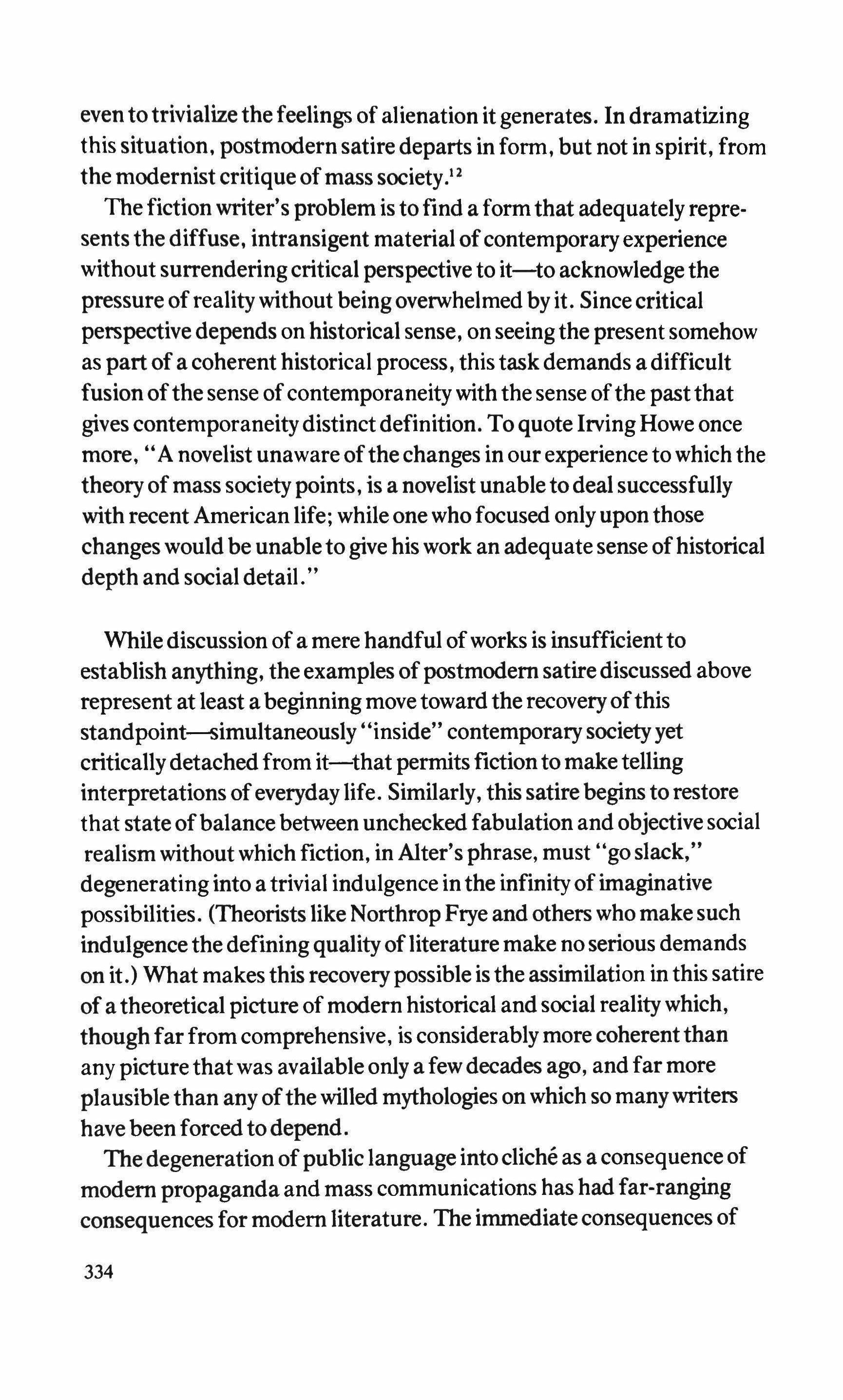
even to trivialize the feelings of alienation it generates. In dramatizing this situation, postmodern satire departs in form, but not in spirit, from the modernist critique of mass society."
The fiction writer's problem is to find a form that adequately represents the diffuse, intransigent material ofcontemporaryexperience without surrenderingcritical perspective to it-to acknowledge the pressure ofreality without beingoverwhelmed by it. Since critical perspectivedepends on historical sense, on seeingthe present somehow as part of a coherent historical process, this task demands a difficult fusion ofthe sense ofcontemporaneity with the sense ofthe pastthat givescontemporaneitydistinct definition. To quote Irving Howe once more, "A novelist unaware ofthe changes in our experience to which the theoryof mass societypoints, is a novelist unable to deal successfully with recent American life; while one who focused only upon those changes would be unable to give his work an adequate sense ofhistorical depth and social detail.
While discussion of a mere handful ofworks is insufficient to establish anything, the examples ofpostmodem satirediscussed above represent at least a beginning move toward the recoveryofthis standpoint---simultaneously "inside" contemporary societyyet criticallydetached from it-that permits fiction to make telling interpretations ofeveryday life. Similarly, this satire begins to restore that state ofbalance between unchecked fabulation and objective social realism without which fiction, in Alter's phrase, must "goslack," degenerating into a trivial indulgence in the infinityof imaginative possibilities. (Theorists like NorthropFrye and others who make such indulgence the defmingqualityofliterature make no serious demands on it.) What makes this recoverypossible is the assimilation in this satire of a theoretical picture of modem historical and social realitywhich, though far from comprehensive, is considerably more coherent than any picture that was available only a fewdecades ago, and far more plausible than any ofthe willed mythologies on which so manywriters have been forced to depend.
The degeneration ofpubliclanguage intocliche as a consequence of modem propaganda and mass communications has had far-ranging consequences for modem literature. The immediateconsequences of 334
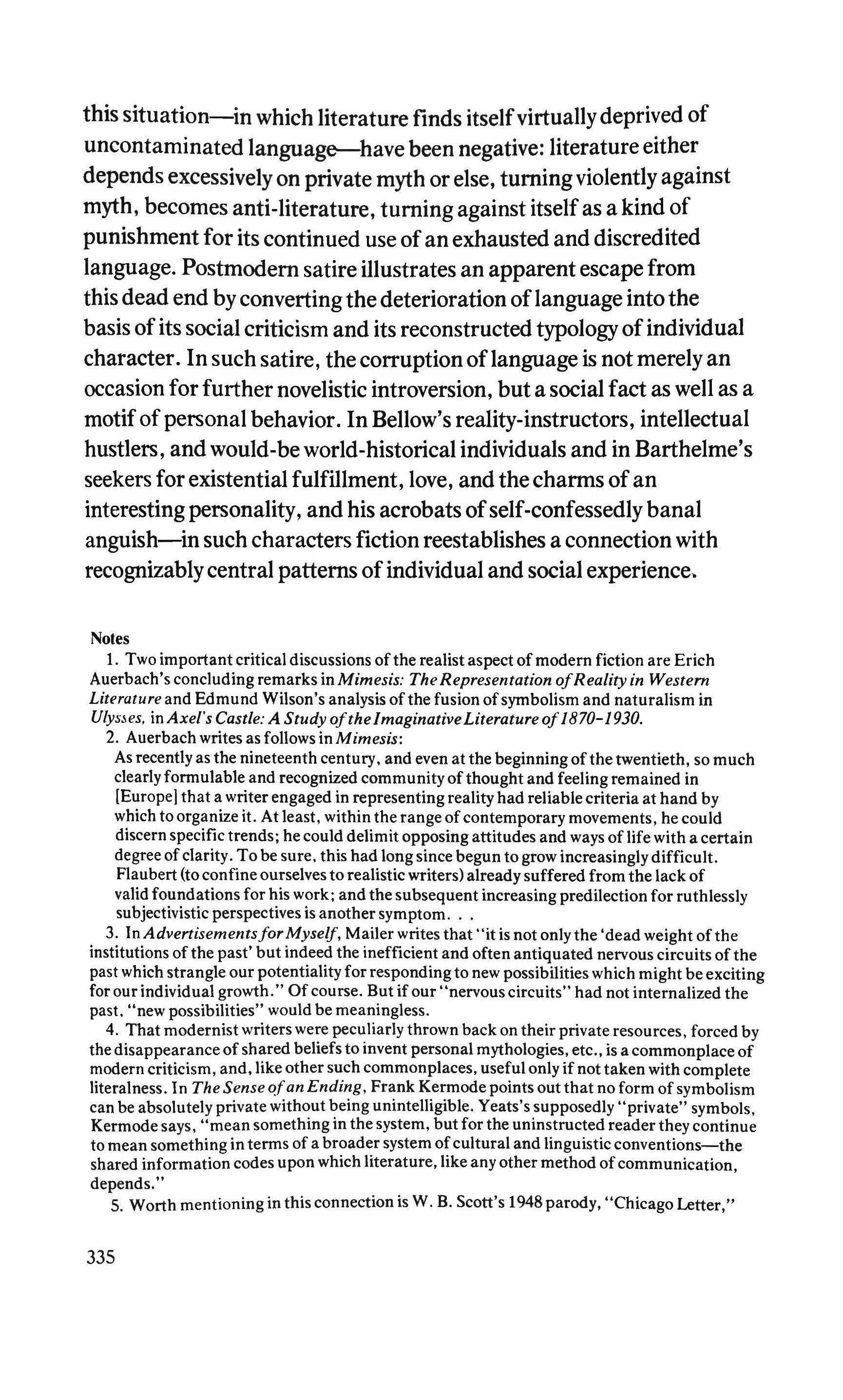
this situation-in which literature finds itselfvirtuallydeprived of uncontaminated language-have been negative: literature either dependsexcessively on privatemyth or else, turningviolentlyagainst myth, becomes anti-literature, turning against itself as a kind of punishment for its continued use of an exhausted and discredited language. Postmodern satire illustrates an apparent escape from this dead end byconvertingthedeterioration oflanguage intothe basis ofits social criticism and its reconstructed typologyofindividual character. In such satire, the corruptionoflanguage is not merely an occasion forfurther novelistic introversion, but a social fact as well as a motifofpersonal behavior. In Bellow's reality-instructors, intellectual hustlers, and would-be world-historical individuals and in Barthelme's seekers for existentialfulfillment, love, and thecharms of an interestingpersonality, and his acrobats ofself-confessedly banal anguish-in such characters fiction reestablishes a connection with recognizablycentral patterns ofindividual and social experience,
Notes
1. Two important critical discussions ofthe realist aspect of modern fiction are Erich Auerbach's concluding remarks in Mimesis: The Representation ofReality in Western Literature and Edmund Wilson's analysis ofthe fusion ofsymbolism and naturalism in Ulysses, in Axel's Castle: A StudyoftheImaginativeLiterature of1870-1930.
2. Auerbach writes as follows in Mimesis:
As recently as the nineteenth century, and even at the beginning of the twentieth, so much clearly formulable and recognized community of thought and feeling remained in [Europe1 that a writer engaged in representingreality had reliable criteria at hand by which to organize it. At least, within the range of contemporary movements, he could discern specific trends; he could delimit opposing attitudes and ways of life with a certain degree ofclarity. To be sure, this had long since begun to grow increasingly difficult. Flaubert (to confine ourselves to realistic writers) already suffered from the lack of valid foundations for his work; and the subsequent increasingpredilection for ruthlessly subjectivistic perspectives is another symptom
3. In AdvertisementsforMyself, Mailer writes that "it is not only the 'dead weight of the institutions of the past' but indeed the inefficient and often antiquated nervous circuits of the past which strangle our potentiality for responding to new possibilities which might be exciting for our individual growth." Of course. But if our "nervous circuits" had not internalized the past. "new possibilities" would be meaningless.
4. That modernist writers were peculiarly thrown back on their private resources, forced by the disappearance of shared beliefs to invent personalmythologies, etc., is a commonplace of modern criticism, and, like other such commonplaces, useful only if not taken with complete literalness. I n The Sense ofan Ending, Frank Kermode points out that no form ofsymbolism can be absolutelyprivate without being unintelligible. Yeats's supposedly "private" symbols, Kermode says, "mean something in the system, but for the uninstructed reader they continue to mean something in terms of a broader system of cultural and linguistic conventions-the shared information codes upon which literature,like any other method of communication, depends."
5. Worth mentioning in this connection is W. B. Scott's 1948 parody, "Chicago Letter,"
335
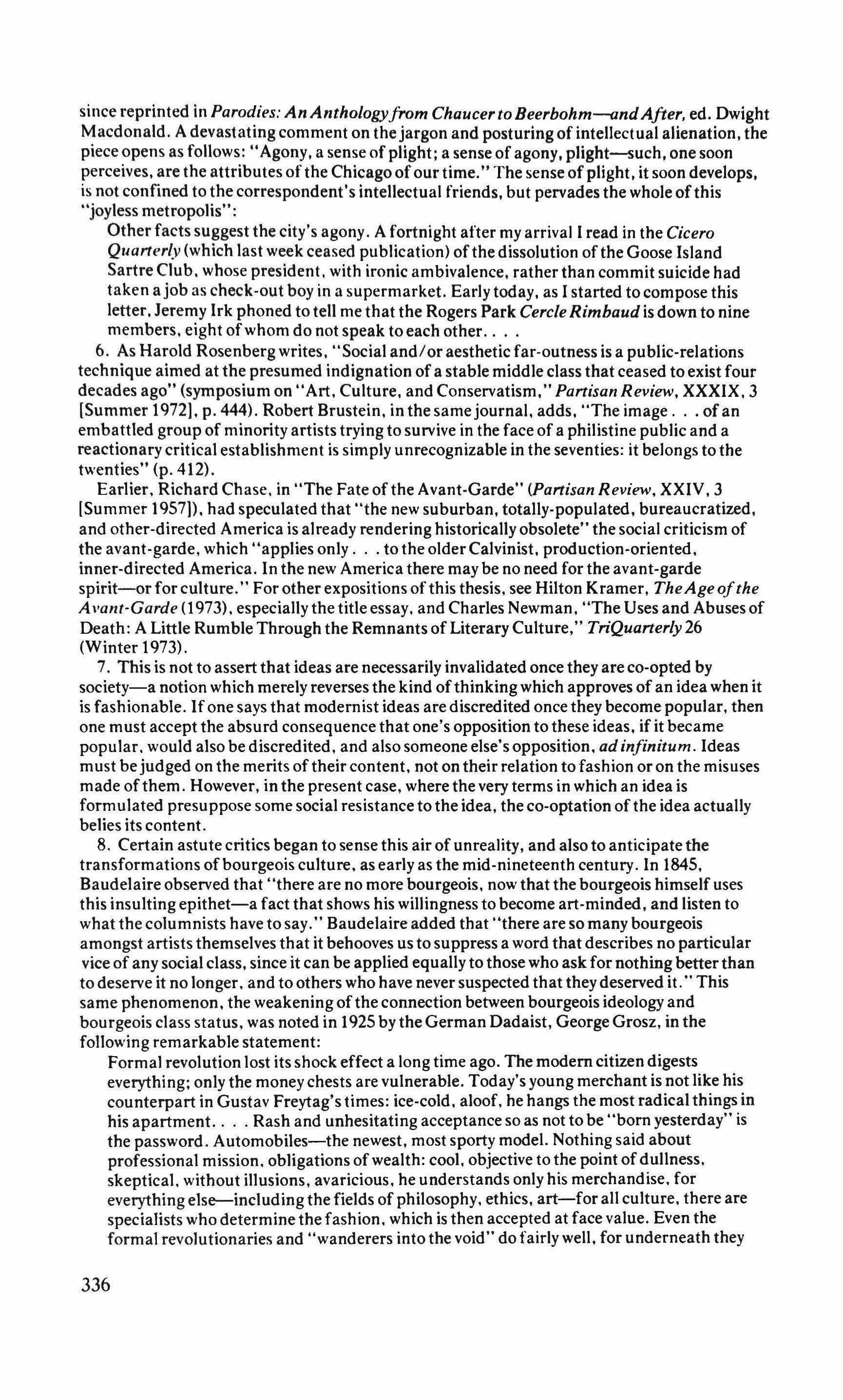
since reprinted in Parodies: An Anthologyfrom Chaucer to Beerbohm+-andAfter, ed. Dwight Macdonald. A devastating comment on thejargon and posturing of intellectual alienation, the piece opens as follows: "Agony, a sense of plight; a sense of agony. plight-such. one soon perceives. are the attributes of the Chicago of our time." The sense ofplight. it soon develops. is not confined to the correspondent's intellectual friends, but pervades the whole of this "joyless metropolis":
Other facts suggest the city's agony. A fortnight after my arrival I read in the Cicero Quarterly (which last week ceased publication) ofthe dissolution ofthe Goose Island Sartre Club. whose president. with ironic ambivalence. rather than commit suicide had taken ajob as check-out boy in a supermarket. Earlytoday. as I started to compose this letter. Jeremy Irk phoned to tell me that the Rogers Park CercleRimbaud is down to nine members. eight ofwhom do not speak to each other
6. As Harold Rosenberg writes. "Social and/or aesthetic far-outness is a public-relations technique aimed at the presumed indignation of a stable middle class that ceased to exist four decades ago" (symposium on "Art. Culture, and Conservatism." Partisan Review. XXXIX. 3 [Summer 1972), p. 444). Robert Brustein, in the same journal. adds. "The image of an embattled group of minority artists trying to survive in the face of a philistine public and a reactionary critical establishment is simplyunrecognizable in the seventies: it belongs to the twenties" (p. 412).
Earlier. Richard Chase. in "The Fate of the Avant-Garde" <Partisan Review, XXIV, 3 [Summer 1957». had speculated that "the new suburban. totally-populated. bureaucratized. and other-directed America is already renderinghistorically obsolete" the social criticism of the avant-garde, which "applies only to the older Calvinist, production-oriented. inner-directed America. In the new America there may be no need for the avant-garde spirit-or for culture." For other expositions ofthis thesis, see Hilton Kramer, TheAgeofthe Avant-Garde (1973). especially the title essay. and Charles Newman. "The Uses and Abuses of Death: A Little Rumble Through the Remnants of Literary Culture," TriQuarterly 26 (Winter 1973).
7. This is not to assert that ideas are necessarily invalidated once they are co-opted by society-a notion which merely reverses the kind ofthinkingwhich approves of an idea when it is fashionable. If one says that modernist ideas are discredited once they become popular. then one must accept the absurd consequence that one's opposition to these ideas, if it became popular. would also be discredited, and also someone else's opposition. adinfinitum. Ideas must be judged on the merits of their content, not on their relation to fashion or on the misuses made ofthem. However, in the present case, where the very terms in which an idea is formulated presuppose some social resistance to the idea, the co-optation of the idea actually belies its content.
8. Certain astute critics began to sense this air of unreality, and also to anticipate the transformations ofbourgeois culture. as early as the mid-nineteenth century. In 1845. Baudelaire observed that "there are no more bourgeois. now that the bourgeois himself uses this insultingepithet-a fact that shows his willingness to become art-minded, and listen to what the columnists have to say." Baudelaire added that "there are so many bourgeois amongst artists themselves that it behooves us to suppress a word that describes no particular vice of any social class, since it can be applied equally to those who ask for nothing betterthan to deserve it no longer. and to others who have never suspected that theydeserved it." This same phenomenon. the weakening ofthe connection between bourgeoisideology and bourgeois class status. was noted in 1925 by the German Dadaist, George Grosz, in the following remarkable statement: Formal revolution lost its shock effect a long time ago. The modern citizen digests everything; only the money chests are vulnerable. Today's young merchant is not like his counterpart in Gustav Freytag's times: ice-cold. aloof. he hangs the most radical things in his apartment Rash and unhesitating acceptance so as not to be "born yesterday" is the password. Automobiles-the newest, most sporty model. Nothing said about professional mission. obligations ofwealth: cool. objective to the point ofdullness. skeptical. without illusions, avaricious. he understands only his merchandise. for everythingelse-including the fields of philosophy. ethics, art-for all culture. there are specialists who determine the fashion. which is then accepted at face value. Even the formal revolutionaries and "wanderers into the void" do fairly well. for underneath they
336
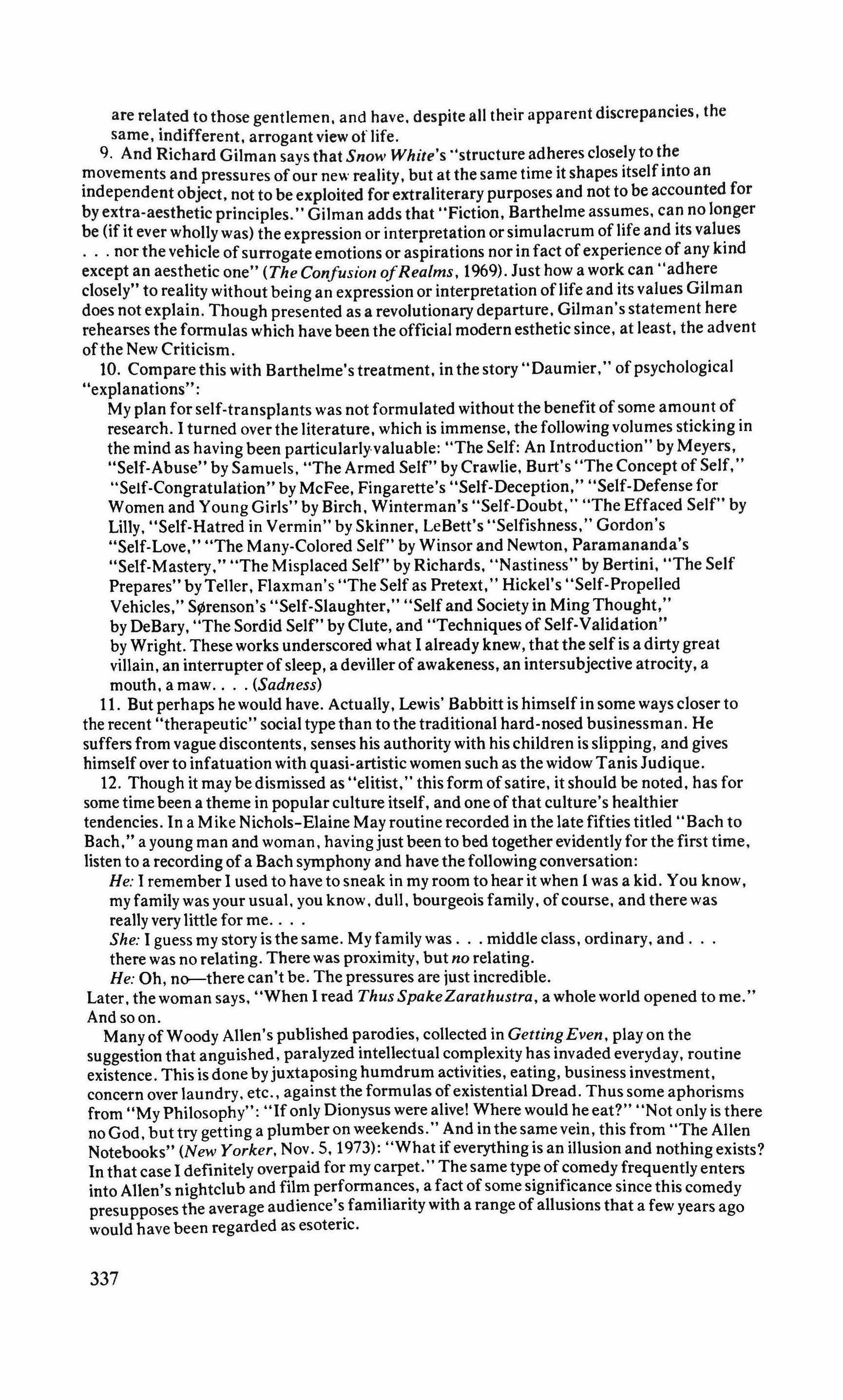
are related to those gentlemen. and have. despite all their apparent discrepancies. the same. indifferent. arrogant view of life.
9. And Richard Gilman says that Snow White's "structure adheres closely to the �ovements and pressures of our new reality, but at the same time it shapes itself into an tndependentobject, not to be exploited for extraliterary purposes and not to be accounted for by extra-aesthetic principles." Gilman adds that "Fiction, Barthelme assumes, can no longer be (if it ever whollywas) the expression or interpretation or simulacrum of life and its values nor the vehicle of surrogate emotions or aspirations nor in fact ofexperience of any kind except an aesthetic one" (The Confusio" ofRealms, 1969). Just how a work can "adhere closely" to reality without being an expression or interpretation oflife and its values Gilman does not explain. Though presented as a revolutionary departure, Gilman's statement here rehearses the formulas which have been the official modern esthetic since, at least, the advent ofthe New Criticism.
10. Compare this with Barthelme's treatment, in the story "Daumier," of psychological "explanations":
My plan for self-transplants was not formulated without the benefit of some amount of research. I turned over the literature, which is immense, the following volumes sticking in the mind as havingbeen particularly-valuable: "The Self: An Introduction" byMeyers, "Self-Abuse" by Samuels, "The Armed Self" by Crawlie, Burt's "The Concept of Self," Self-Congratulation" by McFee, Fingarette's "Self-Deception," "Self-Defense for Women and Young Girls" by Birch, Winterman's "Self-Doubt," "The Effaced Self" by Lilly, "Self-Hatred in Vermin" by Skinner, LeBett's "Selfishness," Gordon's "Self-Love," "The Many-Colored Self" by Winsor and Newton, Paramananda's "Self-Mastery," "The Misplaced Self" by Richards, "Nastiness" by Bertini, "The Self Prepares" by Teller, Flaxman's "The Self as Pretext," Hickel's "Self-Propelled Vehicles," Serenson's "Self-Slaughter," "Self and Society in MingThought," by DeBary, "The Sordid Self" by Clute, and "Techniques of Self-Validation" by Wright. These works underscored what I already knew, that the self is a dirty great villain, an interrupterof sleep, a deviller of awakeness, an intersubjective atrocity, a mouth, a maw (Sadness)
11. Butperhaps he would have. Actually, Lewis' Babbitt is himselfin some ways closer to the recent "therapeutic" social type than to the traditional hard-nosed businessman. He suffers from vague discontents, senses his authority with his children is slipping, and gives himself over to infatuation with quasi-artistic women such as the widow Tanis Judique.
12. Though it may be dismissed as "elitist." this form ofsatire, it should be noted, has for some time been a theme in popular culture itself. and one ofthat culture's healthier tendencies. In a M ike Nichols-Elaine May routine recorded in the late fifties titled "Bach to Bach," a young man and woman, havingjust been to bed togetherevidently for the first time. listen to a recording of a Bach symphony and have the following conversation:
He: I remember I used to have to sneak in my room to hear it when 1 was a kid. You know. my family was your usual. you know. dull. bourgeois family. of course. and there was really very little for me
She: I guess my story is the same. My family was middle class. ordinary. and. there was no relating. There was proximity, but no relating. He: Oh, no-there can't be. The pressures are just incredible. Later, the woman says. "When I read Thus SpakeZarathustra, a whole world opened to me." And soon.
Many of Woody Allen's published parodies, collected in GettingEven, play on the suggestion that anguished, paralyzed intellectual complexity has invaded everyday. routine existence. This is done byjuxtaposing humdrum activities. eating, business investment, concern over laundry. etc., against the formulas ofexistential Dread. Thus some aphorisms from "My Philosophy": "If only Dionysus were alive! Where would he eat?" "Not only is there no God, but try getting a plumber on weekends." And in the same vein. this from "The Allen Notebooks" (New Yorker, Nov. 5, 1973): "What if everything is an illusion and nothing exists? In that case I definitely overpaid for my carpet." The same type of comedyfrequently enters into Allen's nightclub and film performances, a fact of some significance since this comedy presupposes the average audience'S.familiaritywith a range of allusions that a few years ago would have been regarded as esoteric.
337
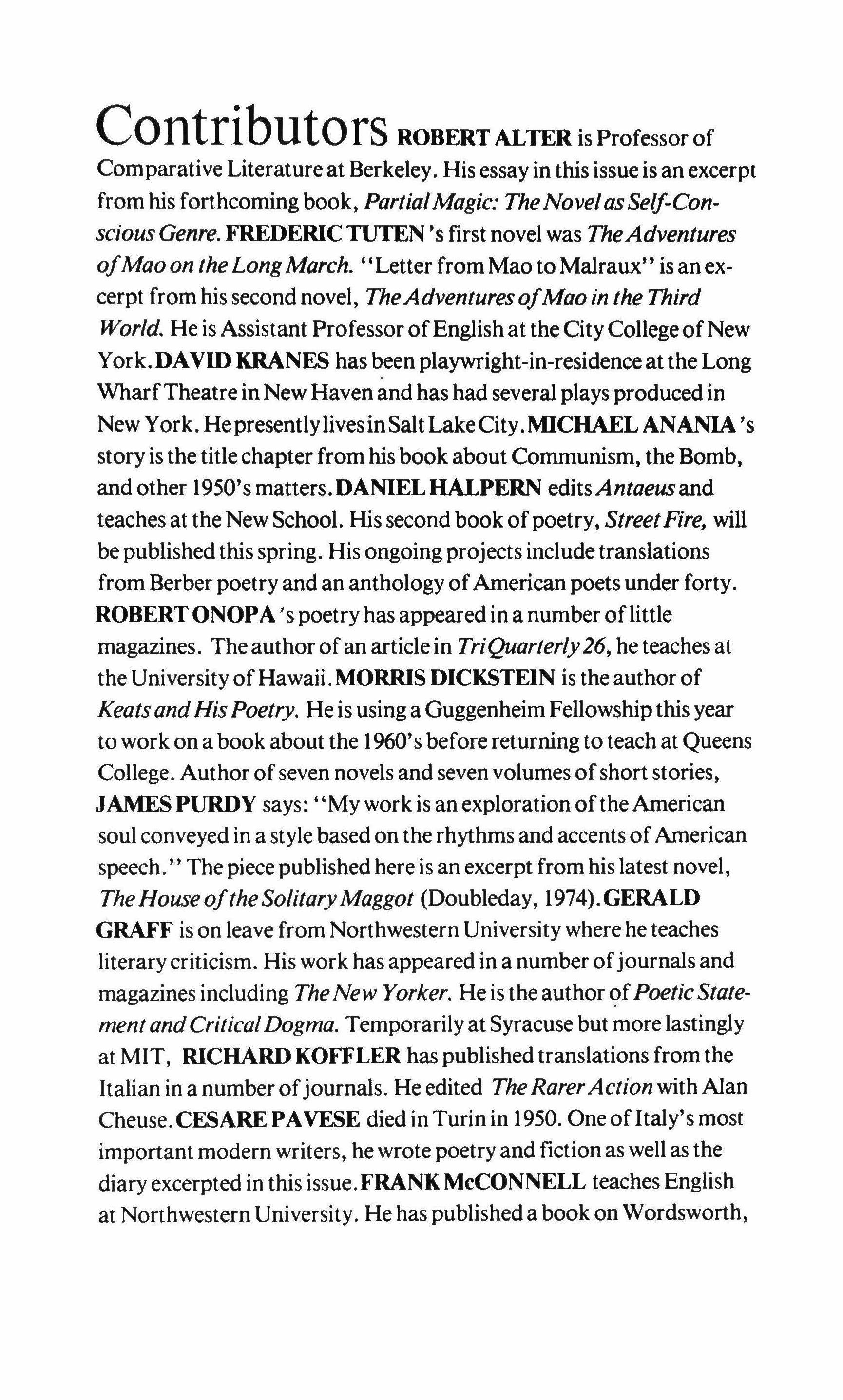
Contributors ROBERT ALTER is Professor of Comparative Literature at Berkeley. His essay in this issueis an excerpt from his forthcomingbook, PartialMagic: TheNovel as Self-Conscious Genre. FREDERIC TUTEN's first novel was TheAdventures ofMao on theLongMarch. "Letter from Mao to Malraux" is an excerpt from his second novel, TheAdventuresofMao in the Third World. He is Assistant Professor ofEnglish at the CityCollegeof New York.DAVID KRANES has been playwright-in-residence at the Long WharfTheatre in New Haven and has had several plays produced in New York. HepresentlylivesinSaltLakeCity. MICHAEL ANANIA 's story is the title chapter from his book about Communism, the Bomb, and other 1950's matters. DANIEL HALPERN editsAntaeusand teaches at the New School. His second book ofpoetry, StreetFire, will be published this spring. His ongoing projects include translations from Berber poetry and an anthology ofAmerican poets under forty. ROBERT ONOPA 's poetry has appeared in a number oflittle magazines. The author of an article in TriQuarterly26, he teaches at the Universityof Hawaii. MORRIS DICKSTEIN is the author of KeatsandHisPoetry. He is using a Guggenheim Fellowship this year to work on a book about the 1960's before returning to teach at Queens College. Author of seven novels and seven volumes ofshort stories, JAMES PURDY says: "My work is an exploration ofthe American soul conveyed in a style based on the rhythms and accents ofAmerican speech." The piece published here is an excerpt from his latest novel, TheHouse oftheSolitaryMaggot (Doubleday, 1974).GERALD GRAFF is on leave from Northwestern University where he teaches literary criticism. His work has appeared in a number ofjournals and magazines including TheNew Yorker. He is the author ofPoeticStatement andCriticalDogma. Temporarily at Syracuse but more lastingly at MIT, RICHARD KOFFLER has published translations from the Italian in a number ofjournals. He edited TheRarerAction with Alan Cheuse. CESARE PAVESE died in Turin in 1950. One of Italy's most important modern writers, he wrote poetry and fiction as well as the diaryexcerpted in this issue. FRANK McCONNELL teaches English at Northwestern University. He has published a book on Wordsworth,
has completed a second book on film, and is using a Guggenheim Fellowship this year to work on a third book growing out ofhis essay in this issue. M. D. ELEVITCH, "a long-time little magazinedoctor," will publish recent work in several anthologies to appear this year, including Statements: NewFiction and NewDepartures in Fiction.
ARTHUR A. COHEN has published two novels, The Carpentered Years, and most recently, In theDaysofSimon Stern. He is also the author of a number ofbooks on contemporary Judaism. PAUL BOWLES lives in Tangiers. He is the author ofseveral novels, an autobiography, WithoutStopping, as well as a number oftranslations from the Moghrebi, including The Lemon, with Mohammed Mrabet.
ALAN SILLITOE 's most recent book is Men, Women and Children.
EDWARD SAID is Professor ofEnglish and Comparative Literature at Columbia University. His forthcoming book is Beginnings: Intention andMethod. He has also written on Middle Eastern and Arabic Literature.WILLIAM E. BIDERBOST was graduated from the University of Illinois in 1967. After working several years as Art Director/ Designer for Chicagoadvertisingagencies, he turned to free-lance illustration and design. He also spent a year at ColumbiaCollege in Chicagoteaching poster design and fantasydrawing. His work has appeared in national magazines andhas been awarded Certificates of Merit and Excellence from CommunicationArtsMagazine, Chicago 4, TheCopy Club ofNew York, and The American Institute ofGraphic Arts. Mr. Biderbost is currentlyworking on a playground design for blind children and a series FirstPictureBooks/orBoysandGirls. He is a collector ofpre-l940 children's books, games, wood-jointed cartoon dolls and Art-Deco kitsch.
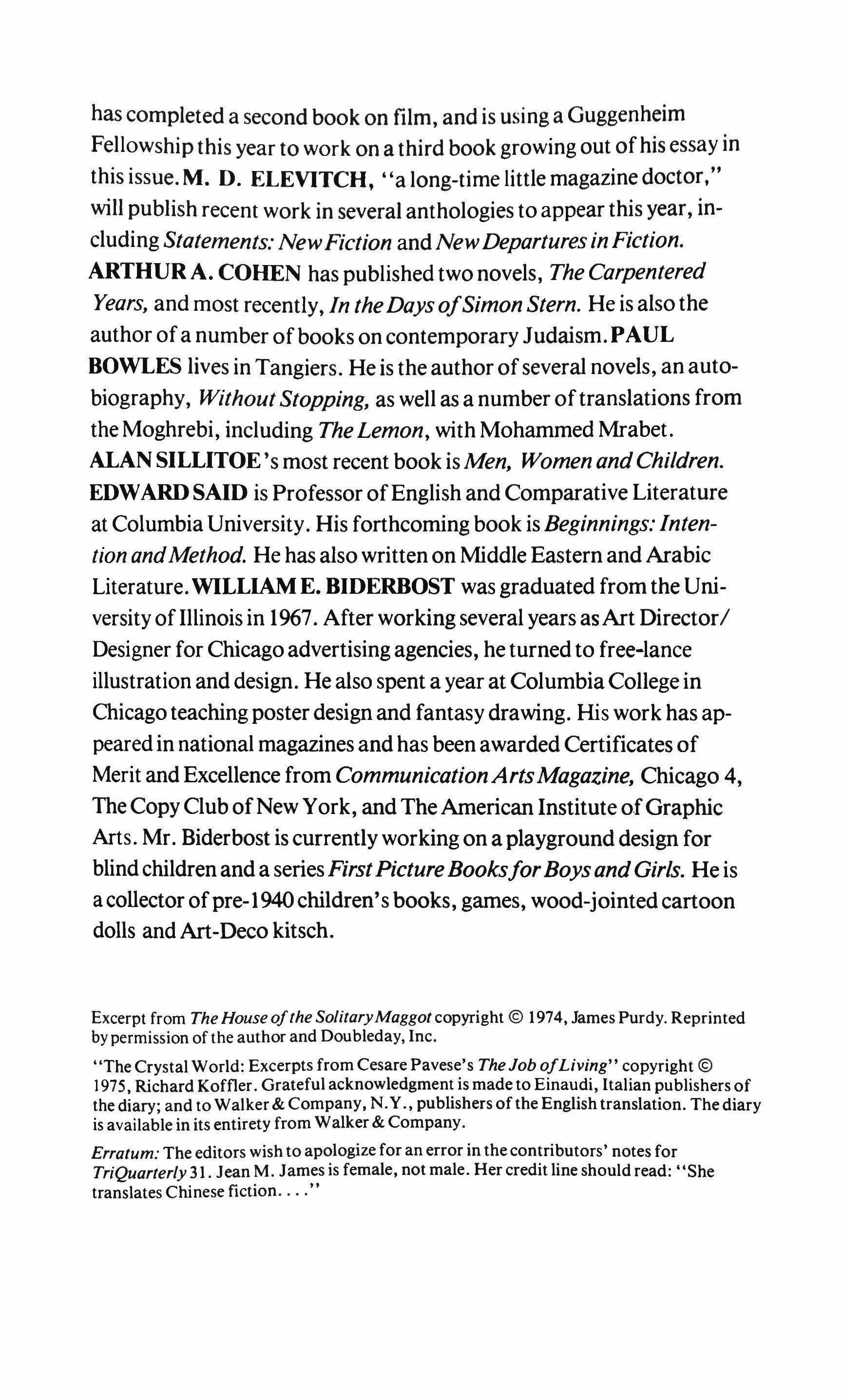
Excerpt from The House ojthe SolitaryMaggotcopyright © 1974, James Purdy. Reprinted bypermission of the author and Doubleday, Inc
'The Crystal World: Excerpts from Cesare Pavese's The Job ojLiving" copyright © 1975, Richard Koffler. Grateful acknowledgment is made to Einaudi, Italian publishers of the diary; and to Walker& Company, N.Y., publishers of the English translation. The diary is available in its entirety from Walker & Company.
Erratum: The editors wish to apologize for an error in the contributors' notes for TriQuarterly 31. Jean M. James is female, not male. Her credit line should read: "She translates Chinese fiction
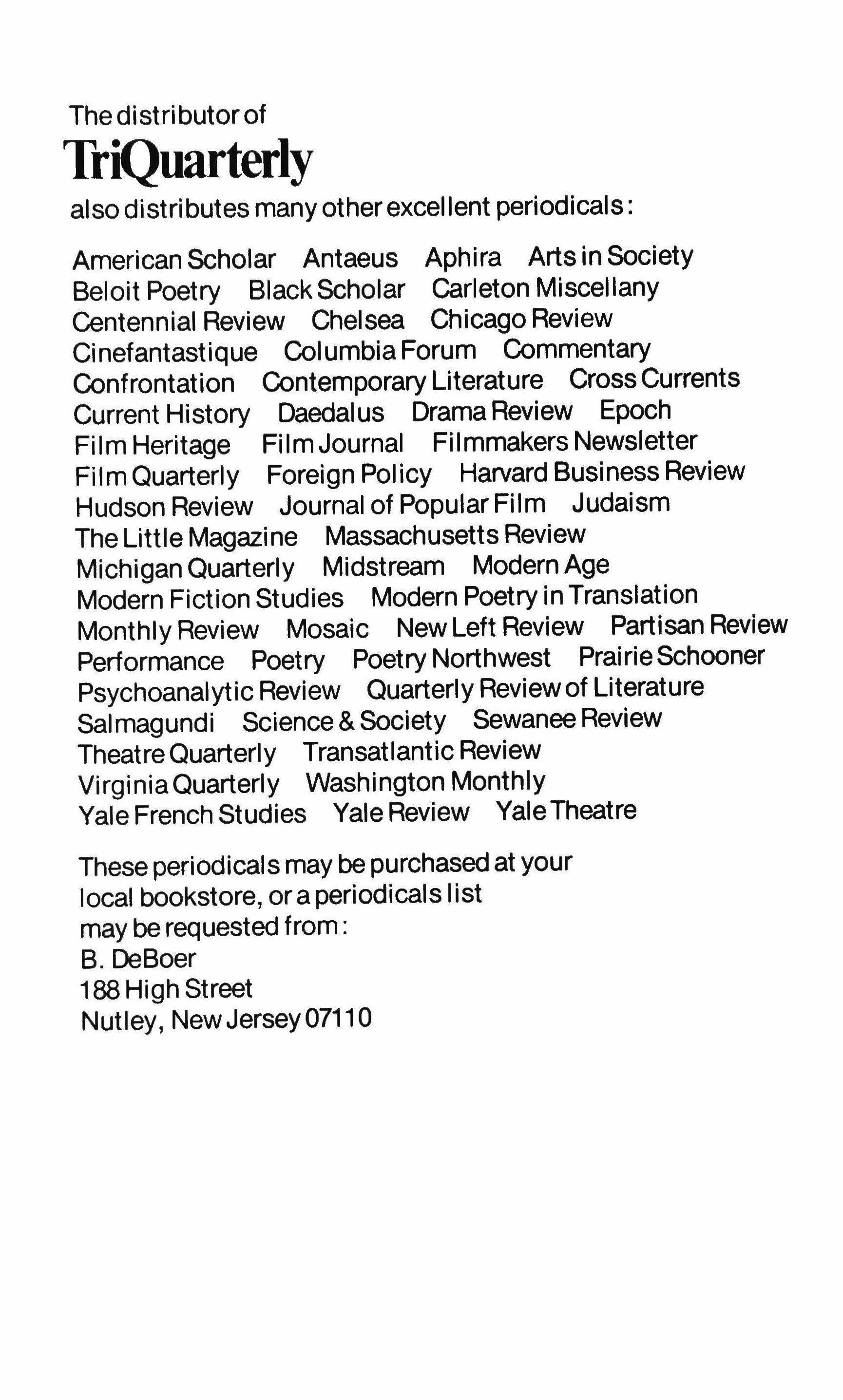
Thedistributorof
TriQuarterly
also distributes many otherexcellent periodicals:
American Scholar Antaeus Aphira Arts in Society
Beloit Poetry Black Scholar Carleton Miscellany
Centennial Review Chelsea Chicago Review
Cinefantastique Columbia Forum Commentary
Confrontation Contemporary Literature Cross Currents
Current History Daedalus Drama Review Epoch
Film Heritage Film Journal Filmmakers Newsletter
Film Quarterly Foreign Policy Harvard Business Review
Hudson Review Journal of Popular Film Judaism
The Little Magazine Massachusetts Review
Michigan Quarterly
Midstream Modern Age
Modern Fiction Studies Modern Poetry in Translation
Monthly Review Mosaic New Left Review Partisan Review
Performance Poetry Poetry Northwest PrairieSchooner
Psychoanalytic Review Quarterly Review of Literature
Salmagundi Science & Society Sewanee Review
Theatre Quarterly Transatlantic Review
VirginiaQuarterly
Washington Monthly
Yale French Studies Yale Review YaleTheatre
These periodicals may be purchased at your local bookstore, or a periodicals list may be requested from: B. DeBoer
188 High Street Nutley, NewJersey07110
TriQuarterly is pleased to announce the first in a series of limited edition posters signed and numbered by contemporary artists. Number 1 in the series is by William Biderbost whose collage/illustrations are featured in TriQuarterIy 33. The Poster was silk screened under the supervision of the artist in five colors on Strathmore in an edition of 275.
To order send check or money order to TriQuarterly 101 University Hall Northwestern University Evanston, lllinois W201 As this is a limited edition orders will be honored in order of receipt.
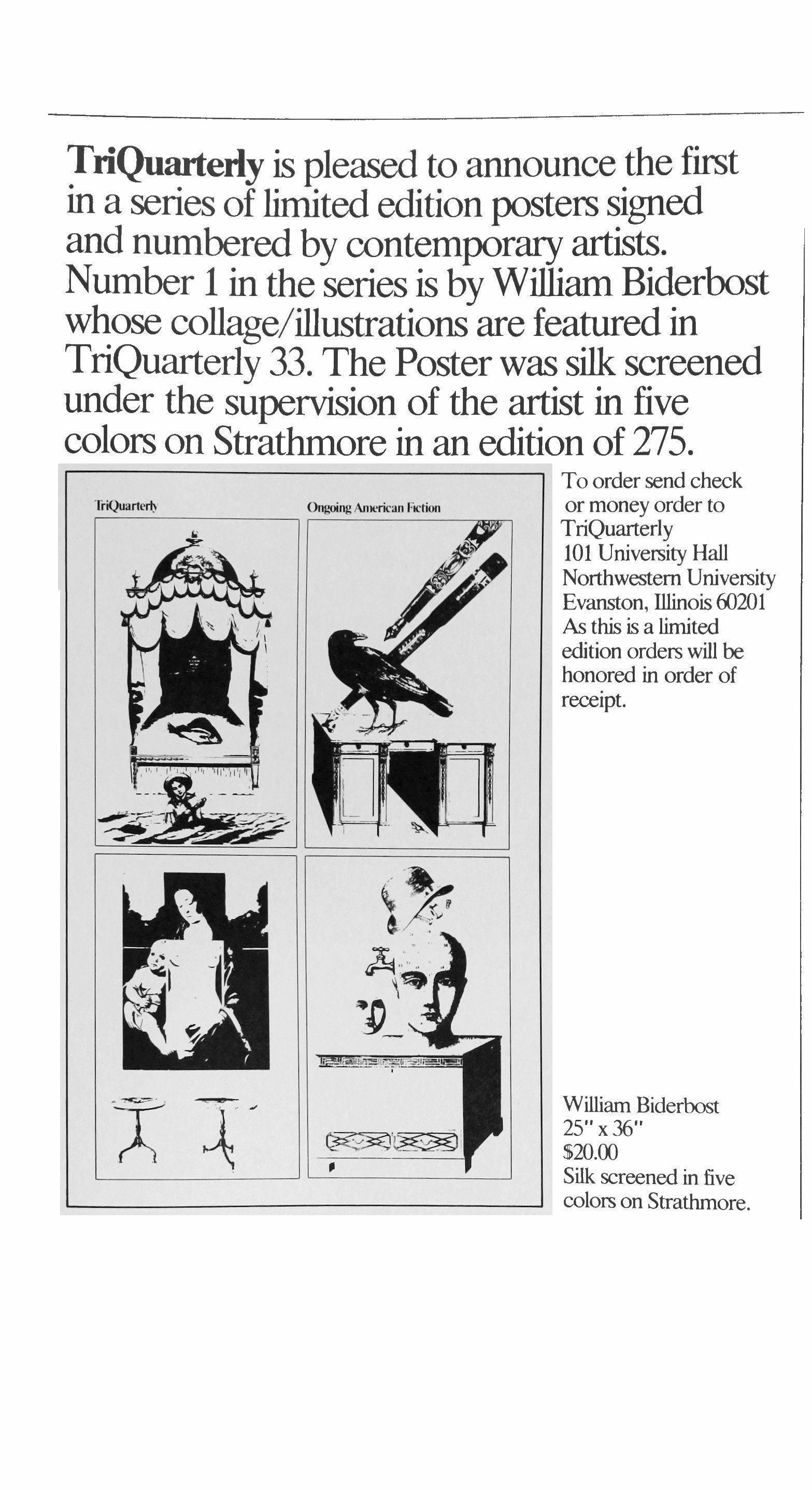
William Biderbost 25" x36" $20.00
Silk screened in five colors on Strathmore.
�·lriQ_ua_rt.r!I_. OngoingAIII<ricanl'ocriofl


esPurdy
D. Elevitch
thor it. Cohen
vidKranes
bert Onopa
.chael Anania
·elHaipemulBowles
m Sillitoe
sarePavese
bert Alter
lwardSaid
xris Dickstein
auk McConnell
�rald Graff
ehard Kolfler
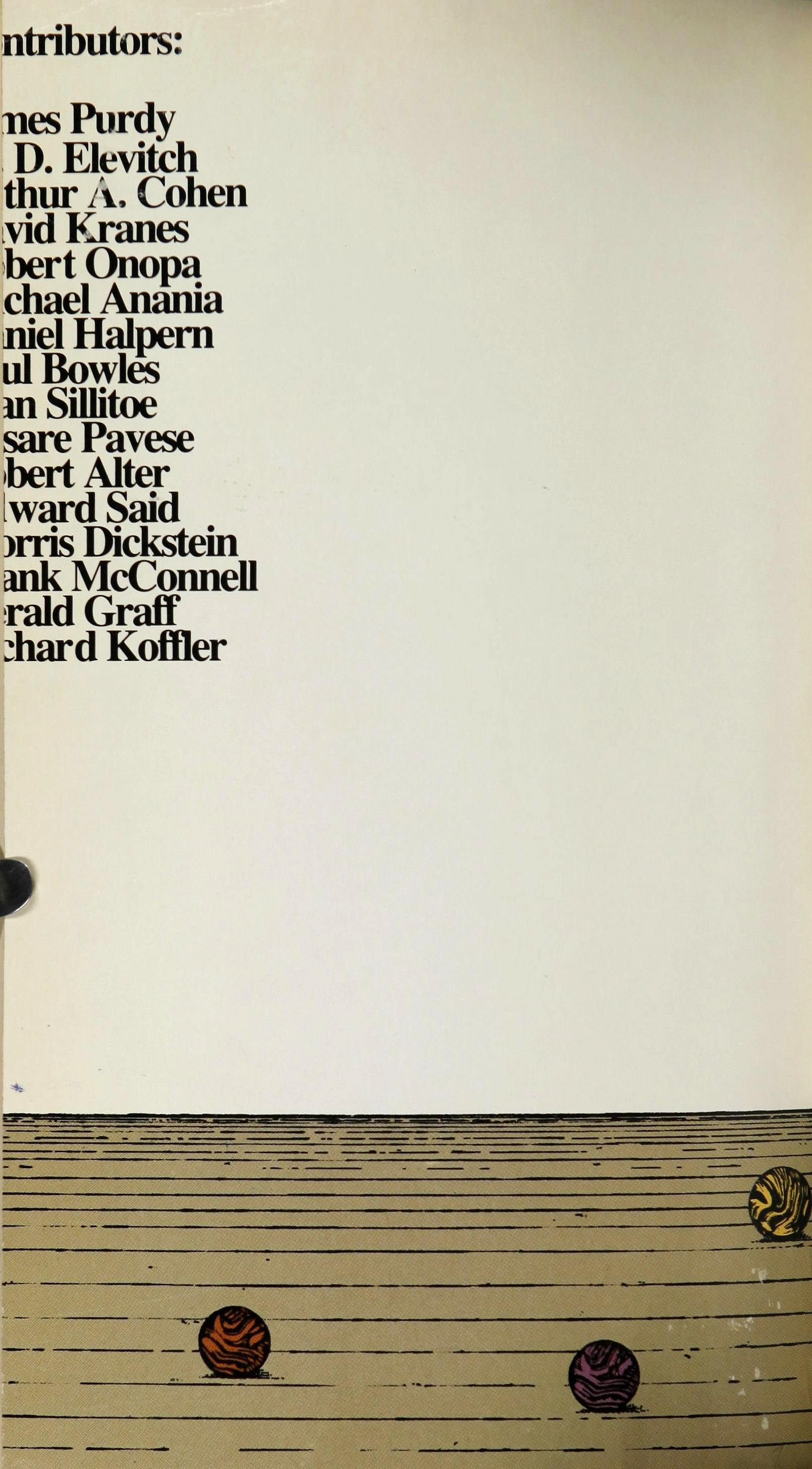
-'-----"I

























































































































































































































































































































































